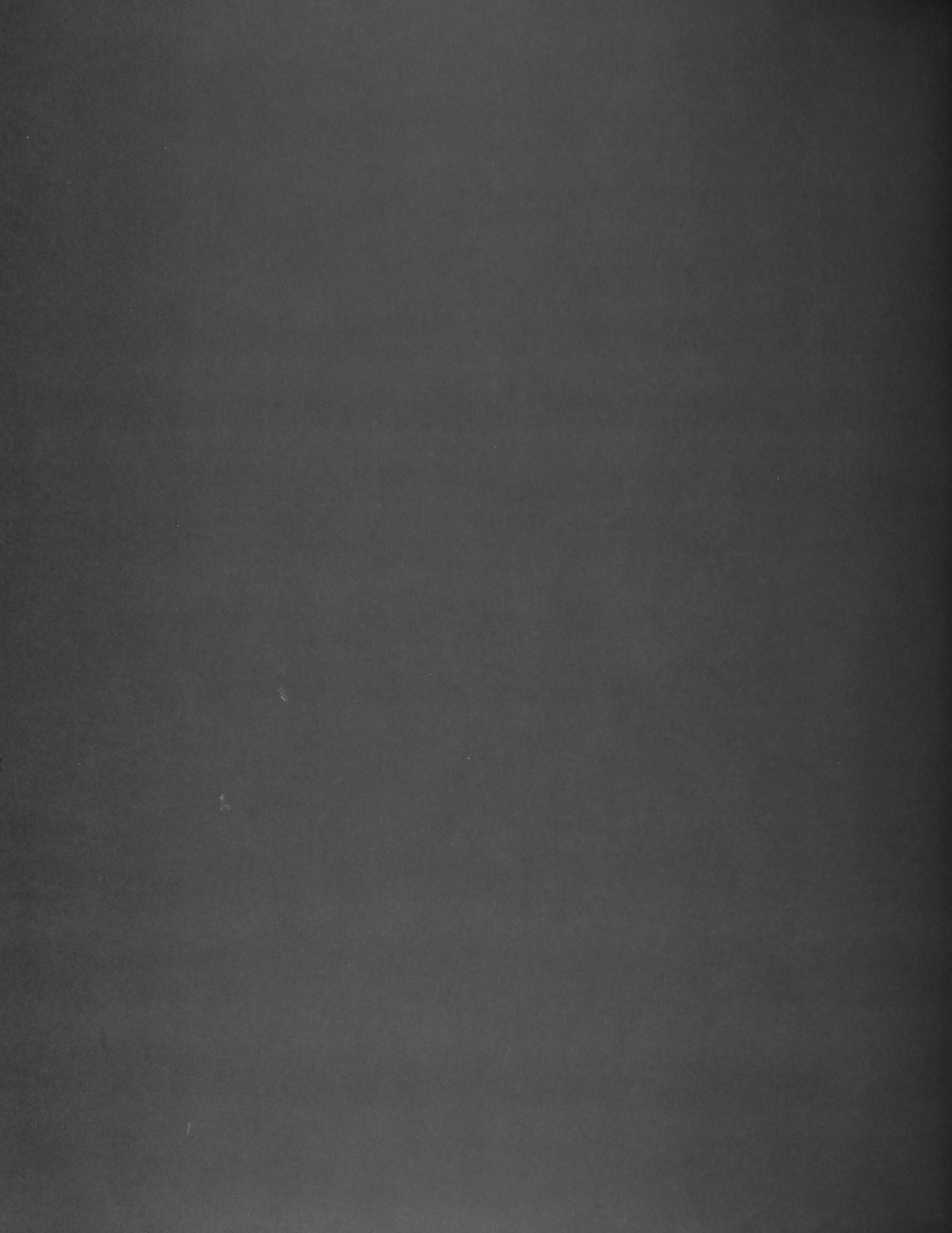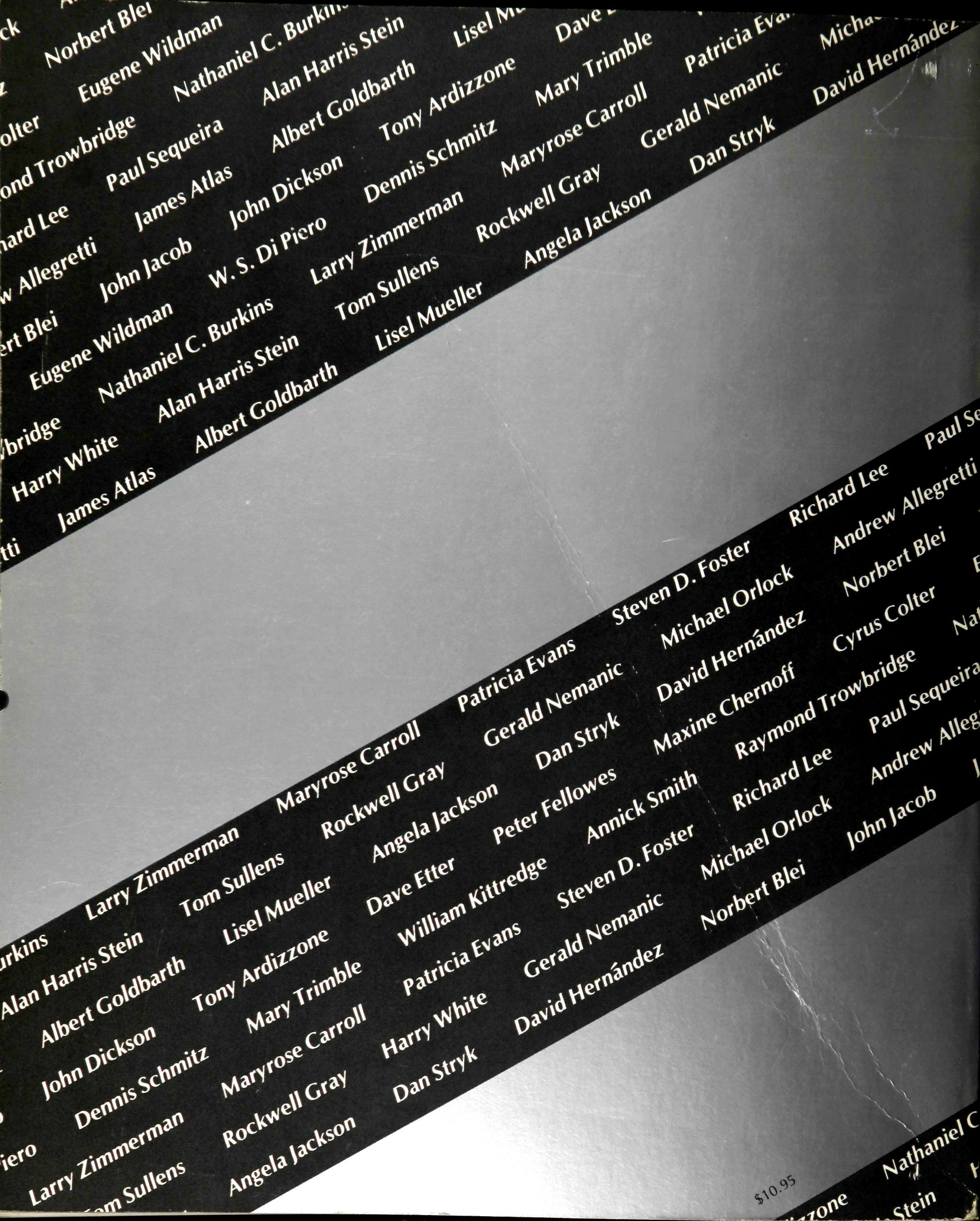












with the assistance of Fred Shafer
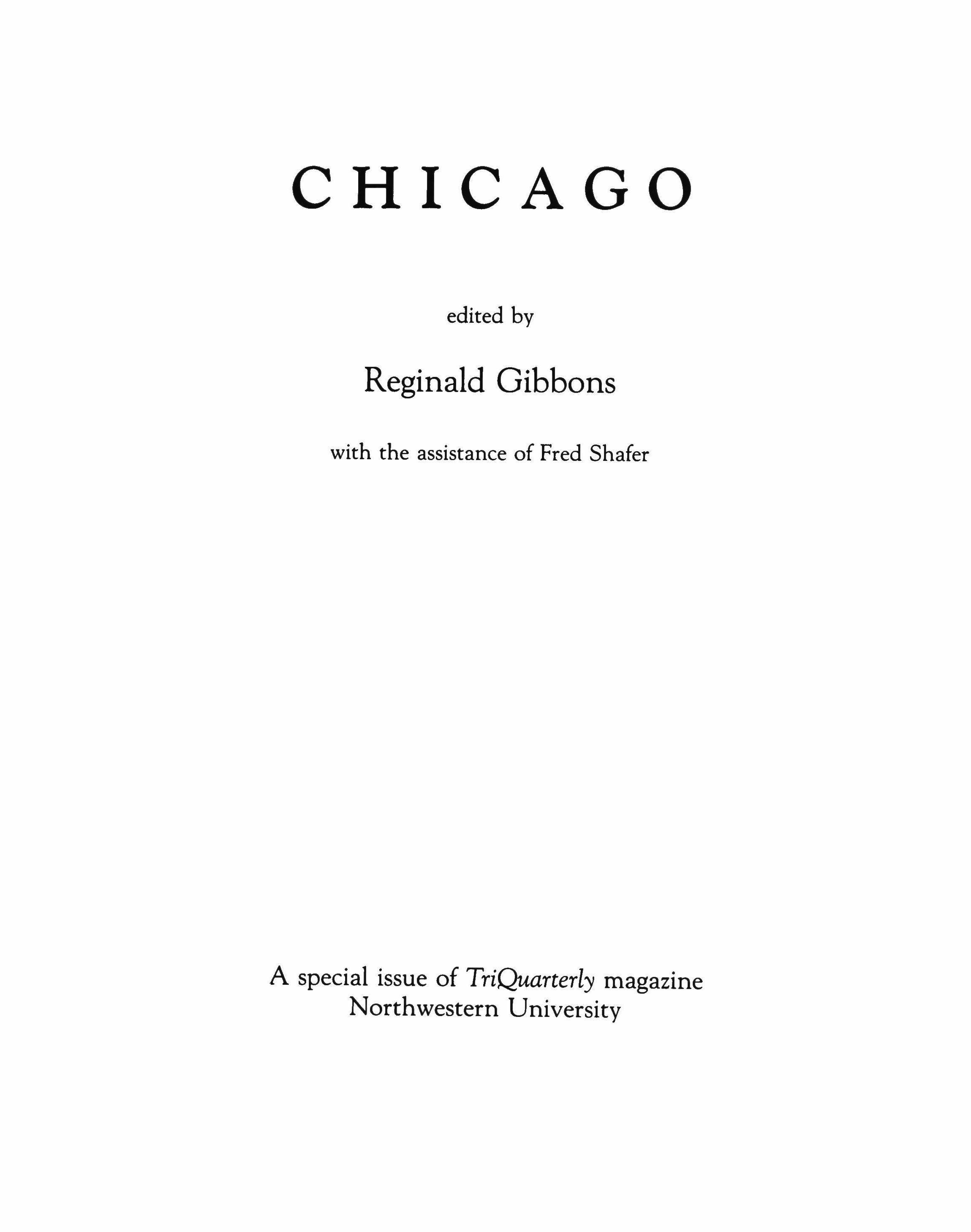
A special issue of TriQuarterly magazine
Northwestern University

Facing title page:
"Chicago River," 1983. Alan Harris Stein.Spring/Summer 1984
Editor
Executive Editor
Managing Editor
Fiction Editor
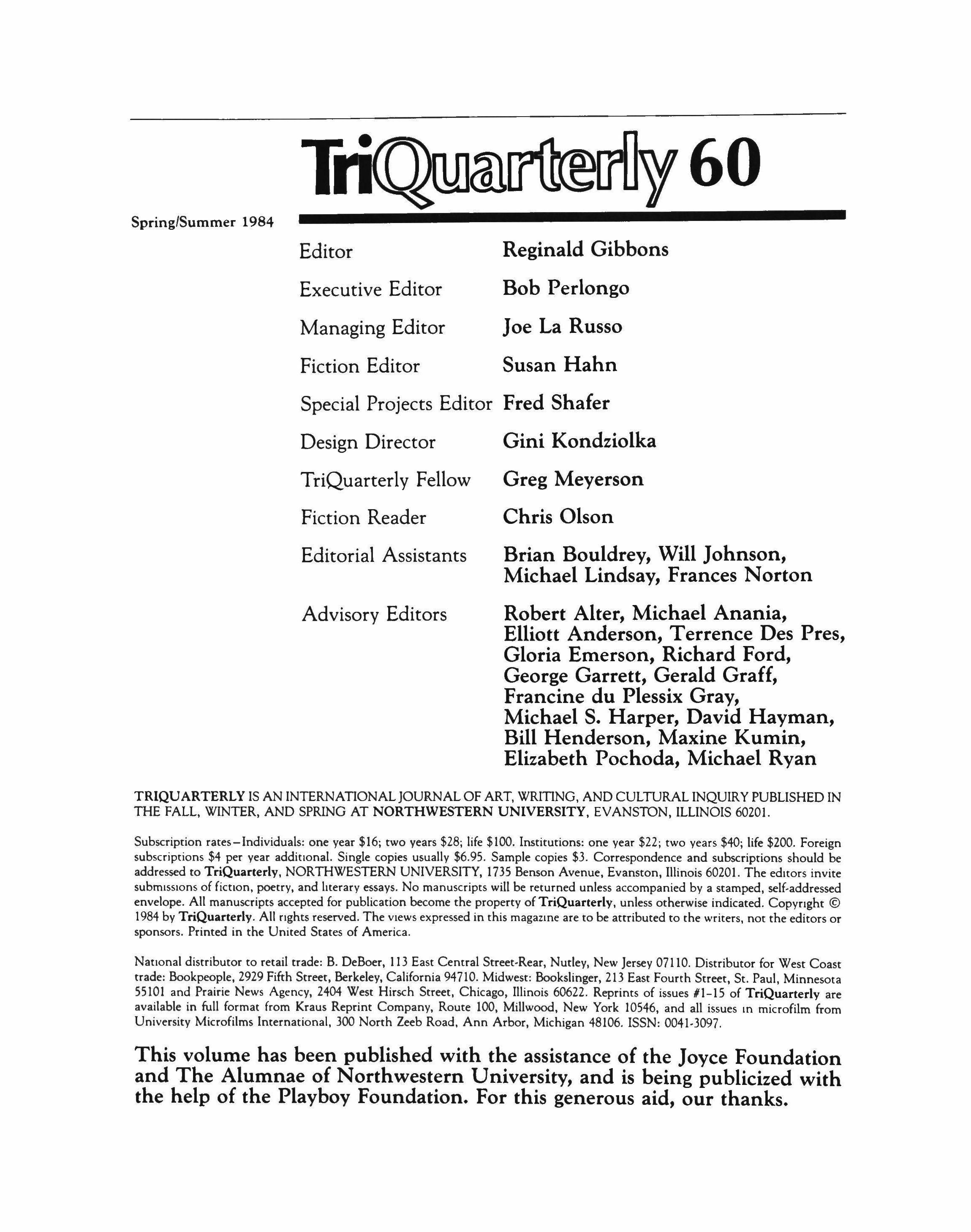
Reginald Gibbons
Bob Perlongo
Joe La Russo
Susan Hahn
Special Projects Editor Fred Shafer
Design Director Gini Kondziolka
TriQuarterly Fellow
Fiction Reader
Editorial Assistants
Advisory Editors
Greg Meyerson
Chris Olson
Brian Bouldrev, Will Johnson, Michael Lindsay, Frances Norton
Robert Alter, Michael Anania, Elliott Anderson, Terrence Des Pres, Gloria Emerson, Richard Ford, George Garrett, Gerald Graff, Francine du Plessix Gray, Michael S. Harper, David Hayman, Bill Henderson, Maxine Kumin, Elizabeth Pochoda, Michael Ryan
TRIQUARTERLY IS AN INTERNATIONAL JOURNAL OF ART, WRITING, AND CULTURAL INQUIRY PUBLISHED IN THE FALL, WINTER, AND SPRING AT NORTHWESTERN UNIVERSITY, EVANSTON, ILLINOIS 60201.
Subscription rates -Individuals: one year $16; two years $28; life $100. Institutions: one year $22; two years $40; life $200. Foreign subscriptions $4 per year additional. Single copies usually $6.95. Sample copies $3. Correspondence and subscriptions should be addressed to TriQuarterly, NORTHWESTERN UNIVERSITY, 1735 Benson Avenue, Evanston, lllinois 60201. The editors invite subrnissions of fiction, poetry, and hterarv essays. No manuscripts will be returned unless accompanied by a stamped, self-addressed envelope. All manuscripts accepted for publication become the property of TriQuarterly, unless otherwise indicated. COPYright © 1984 by TriQuarterly. All rights reserved. The views expressed in this rnagazine are to be attributed to the writers, not the editors or sponsors. Printed in the United States of America.
National distributor to retail trade: B. DeBoer, 113 East Central Street-Rear, Nutley, New Jersey 07110. Distributor for West Coast trade: Bookpeople, 2929 Fifth Street, Berkeley, California 94710. Midwest: Bookslinger, 213 East Fourth Street, St. Paul, Minnesota 55101 and Prairie News Agency, 2404 West Hirsch Street, Chicago, Illinois 60622. Reprints of issues #1-15 of TriQuarterly are available in full format from Kraus Reprint Company, Route 100, Millwood, New York 10546, and all issues 10 microfilm ftom University Microfilms International, 300 North Zeeb Road, Ann Arbor, Michigan 48106. ISSN: 0041-3097.
This volume has been published with the assistance of the Joyce Foundation and The Alumnae of Northwestern University, and is being publicized with the help of the Playboy Foundation. For this generous aid, our thanks.
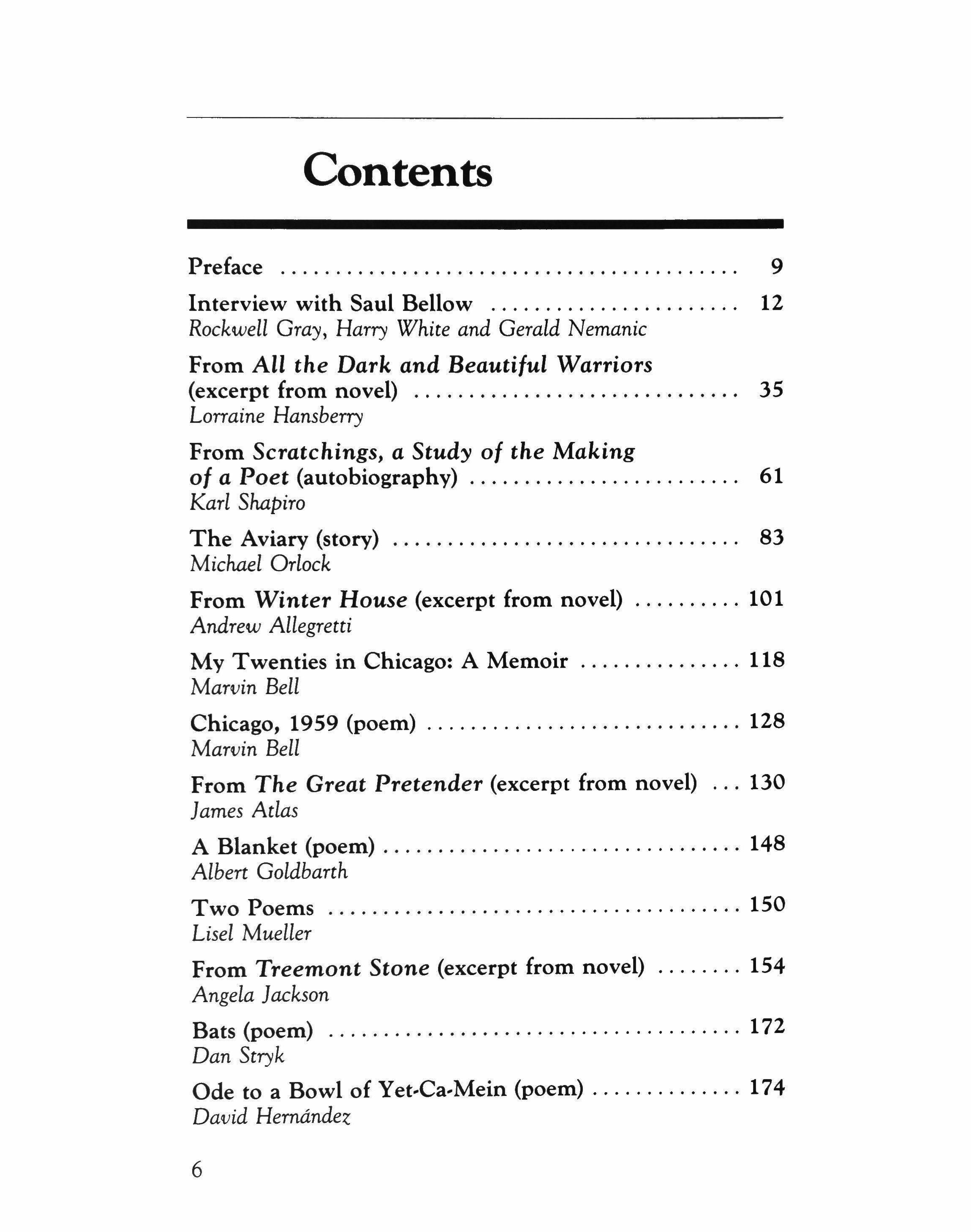
From In the Dock (excerpt from novel)
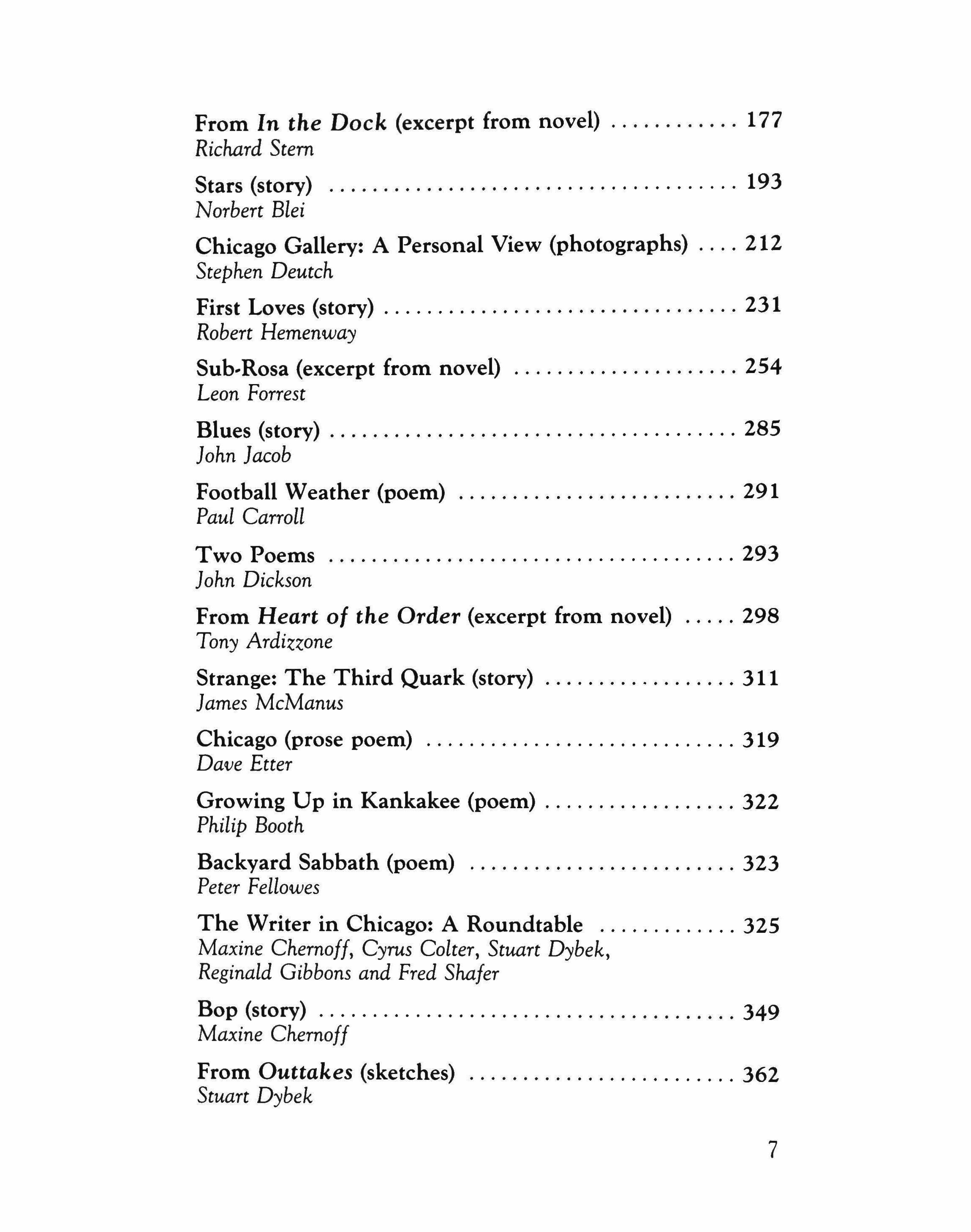
Chicago Gallery: A Personal View (photographs)
Loves (story)
Hemenway Sub-Rosa (excerpt from novel)
Chernoff, Cyrus Colter, Stuart Dybek, Reginald Gibbons and Fred Shafer
at

W. S. Di Piero
Gallagher's Old Man (excerpt from novel)
Heinemann The Last Escapade (story)
Mark Petrakis
Schmitz
Cover design by Gini Kondziolka. Photographs by Nathaniel C. Burkins, Maryrose Carroll, Stephen Deutch, Patricia Evans, Steven D. Foster, Richard Lee, Paul Sequeira, Arthur Shay, Alan Harris Stein, Tom Sullens, Raymond Trowbridge and Larry Zimmerman; except for the pictures of the Macleans (page 421), all photos have adjacent credit lines.
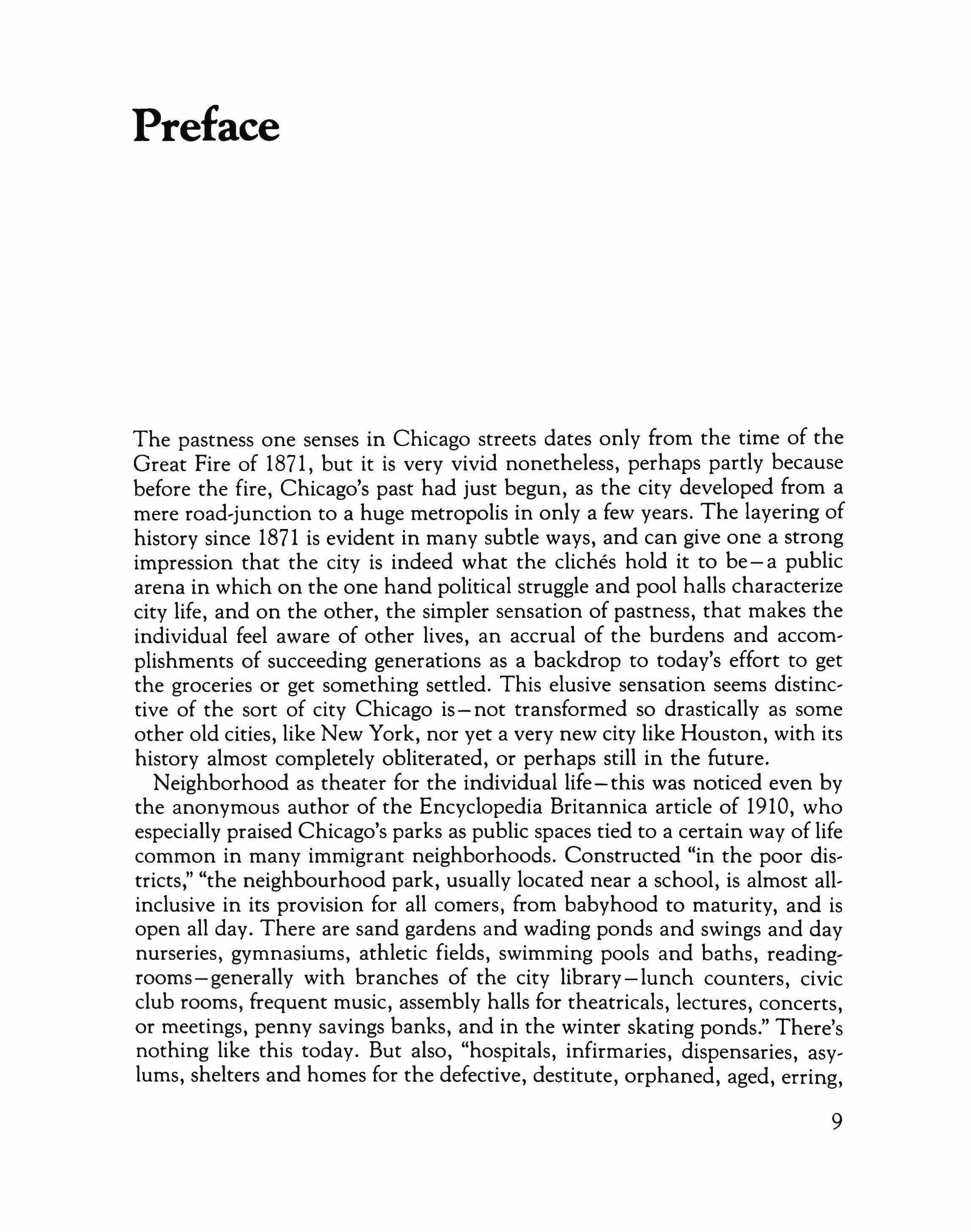
The pastness one senses in Chicago streets dates only from the time of the Great Fire of 1871, but it is very vivid nonetheless, perhaps partly because before the fire, Chicago's past had just begun, as the city developed from a mere road-junction to a huge metropolis in only a few years. The layering of history since 1871 is evident in many subtle ways, and can give one a strong impression that the city is indeed what the cliches hold it to be-a public arena in which on the one hand political struggle and pool halls characterize city life, and on the other, the simpler sensation of pastness, that makes the individual feel aware of other lives, an accrual of the burdens and accornplishments of succeeding generations as a backdrop to today's effort to get the groceries or get something settled. This elusive sensation seems distinctive of the sort of city Chicago is-not transformed so drastically as some other old cities, like New York, nor yet a very new city like Houston, with its history almost completely obliterated, or perhaps still in the future.
Neighborhood as theater for the individual life-this was noticed even by the anonymous author of the Encyclopedia Britannica article of 1910, who especially praised Chicago's parks as public spaces tied to a certain way of life common in many immigrant neighborhoods. Constructed "in the poor dis, tricts," "the neighbourhood park, usually located near a school, is almost all, inclusive in its provision for all comers, from babyhood to maturity, and is open all day. There are sand gardens and wading ponds and swings and day nurseries, gymnasiums, athletic fields, swimming pools and baths, reading, rooms - generally with branches of the city library-lunch counters, civic club rooms, frequent music, assembly halls for theatricals, lectures, concerts, or meetings, penny savings banks, and in the winter skating ponds." There's nothing like this today. But also, "hospitals, infirmaries, dispensaries, asvlums, shelters and homes for the defective, destitute, orphaned, aged, erring,

friendless and incurably diseased; various relief societies, and associanons that sift the good from the bad among the mendicant, the economically inefficient, and the viciously pauper, represent the charity work of the city." These two civic impulses reflected the defining contradictions of an age-the city providing on the one hand every wholesome aid to the pleasant urilization of leisure for selt-improvement and recreation, and on the other, institutions to "sift the good from the bad" among "the economically inefficient" (the cruel euphemism belying the pious intent, perhaps). Add to this men, tion of the famous strikes of the late nineteenth century, and you have the Chicago of improvable man and unblinkable inequity that once animated the imagination of many American writers. Nowadays, in the city of the continuing arrival of immigrants from abroad, and of the historic emigration of Southern blacks, there are few or none of the indignant and indicting novels that perhaps characterized a period in American culture as much as a particular city.
But there is still a sense of story, it seems, in many works that take Chicago as setting, and that may be what was inherited from the earlier writers. They drew their morals from the exemplary lives of executives and meatpackers; now, in our culture of the image, the prevailing trend of fiction has been away from both the moral pronouncement and from story, toward unjudging observation, toward fragment and image-no accidental directions, given modern advertising culture. But the persistence of something of the old Chicago, if it has not spurred contemporary writers to address large public questions, still seems a spur toward story.
One whose experience has brought him or her through Chicago-for a lifetime or a visit-can find hints and traces of story not only in the lines and decor of buildings and streets, but also in all sorts of other evidence, as the photographs in this volume show. Partly this is an aspect of all urban life, where a chance encounter can seem to reveal the meaning of a life's suffering or happiness. Partly it is because of the distinctive durability of the modest Chicago buildings, so many of which were built of brick and stone after the fire. And partly it is because some of the neighborhoods, with their parkshowever reduced in civic aims and amenities - and their periods of ethnic homogeneity, seem to have been so much little cities that the buildings reveal the whole range of human activity in the space of a few blocks. Changes with time do not always destroy this aura. If the headquarters of the Industrial Workers of the World has given way, suddenly or by stages, to a punk-rock bar, that does not mean older residents have forgotten the former occupants of the building, and won't always regard it as the home of the Wobblies. The literary imagination, even without knowledge of the specificities of change,
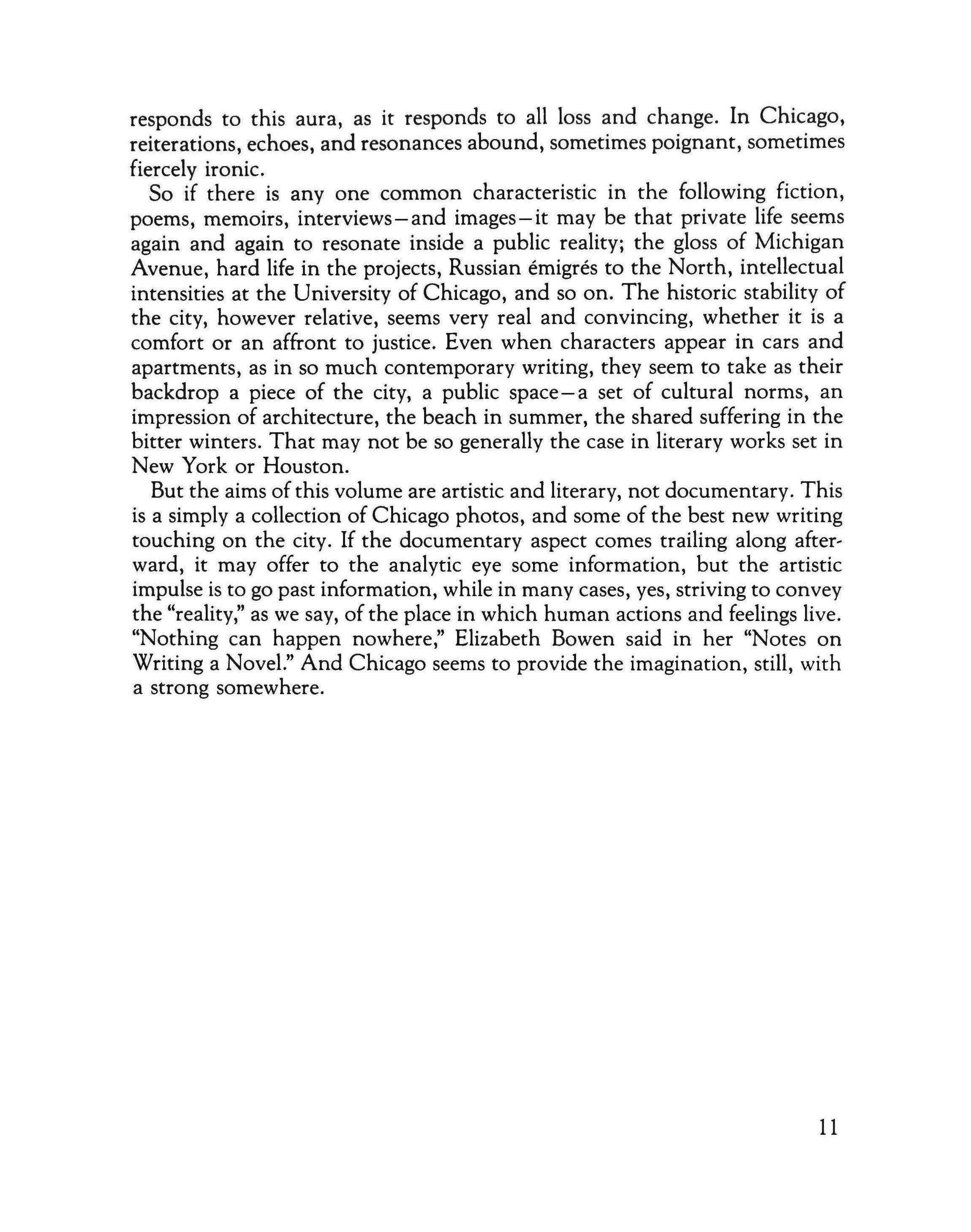
responds to this aura, as it responds to all loss and change. In Chicago, reiterations, echoes, and resonances abound, sometimes poignant, sometimes fiercely ironic.
So if there is anyone common characteristic in the following fiction, poems, memoirs, interviews-and images-it may be that private life seems again and again to resonate inside a public reality; the gloss of Michigan Avenue, hard life in the projects, Russian emigres to the North, intellectual intensities at the University of Chicago, and so on. The historic stability of the city, however relative, seems very real and convincing, whether it is a comfort or an affront to justice. Even when characters appear in cars and apartments, as in so much contemporary writing, they seem to take as their backdrop a piece of the city, a public space-a set of cultural norms, an impression of architecture, the beach in summer, the shared suffering in the bitter winters. That may not be so generally the case in literary works set in New York or Houston.
But the aims of this volume are artistic and literary, not documentary. This is a simply a collection of Chicago photos, and some of the best new writing touching on the city. If the documentary aspect comes trailing along afterward, it may offer to the analytic eye some information, but the artistic impulse is to go past information, while in many cases, yes, striving to convey the "reality," as we say, of the place in which human actions and feelings live. "Nothing can happen nowhere," Elizabeth Bowen said in her "Notes on Writing a Novel." And Chicago seems to provide the imagination, still, with a strong somewhere.
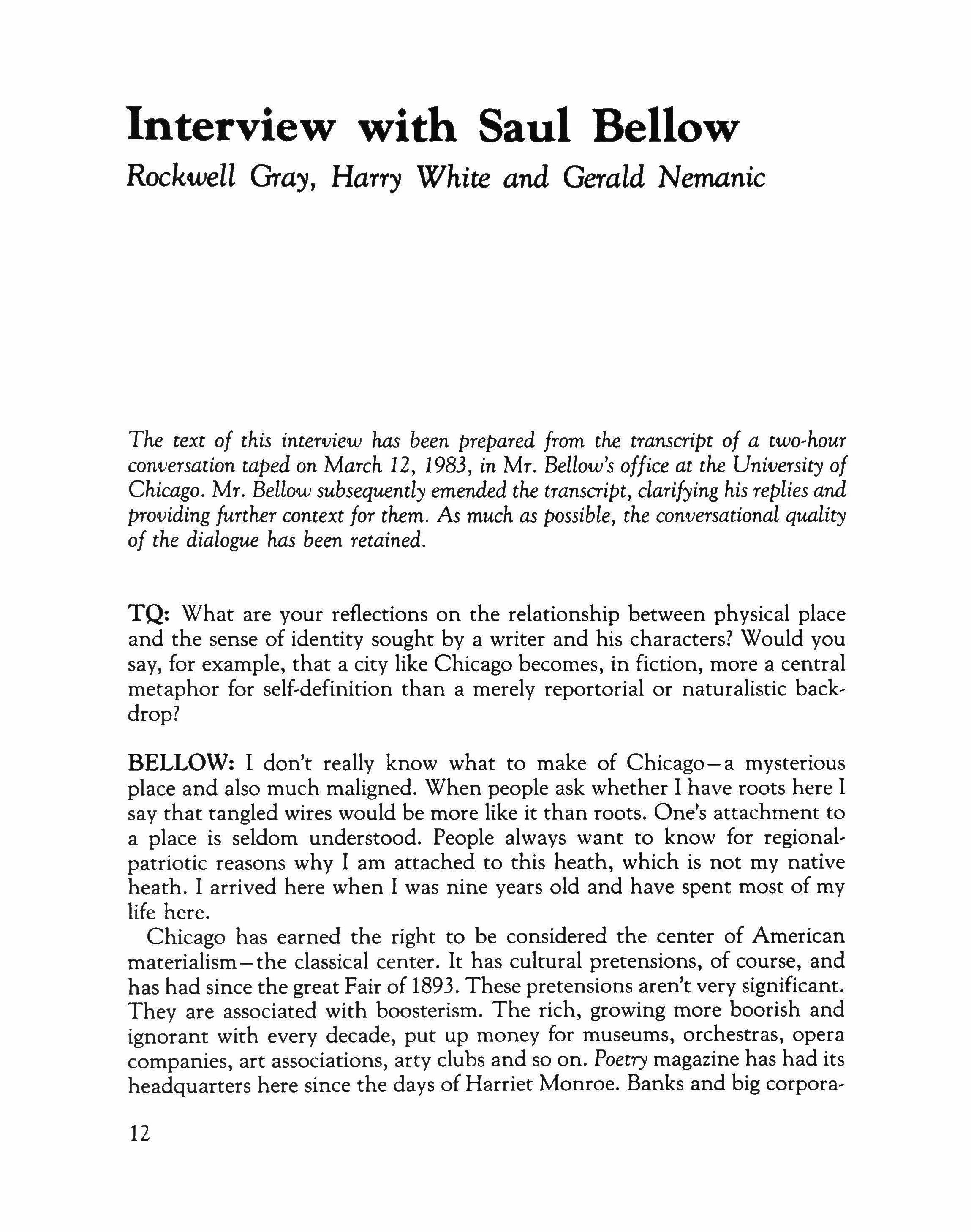
The text of this interview has been prepared from the transcript of a two�hour conversation taped on March 12, 1983, in Mr. Bellow's office at the University of Chicago. Mr. Bellow subsequently emended the transcript, clarifying his replies and providing further context for them. As much as possible, the conversational quality of the dialogue has been retained.
TQ: What are your reflections on the relationship between physical place and the sense of identity sought by a writer and his characters? Would you say, for example, that a city like Chicago becomes, in fiction, more a central metaphor for self-definition than a merely reportorial or naturalistic backdrop?
BELLOW: I don't really know what to make of Chicago-a mysterious place and also much maligned. When people ask whether I have roots here I say that tangled wires would be more like it than roots. One's attachment to a place is seldom understood. People always want to know for regionalpatriotic reasons why I am attached to this heath, which is not my native heath. I arrived here when I was nine years old and have spent most of my life here.
Chicago has earned the right to be considered the center of American materialism-the classical center. It has cultural pretensions, of course, and has had since the great Fair of 1893. These pretensions aren't very significant. They are associated with boosterism. The rich, growing more boorish and ignorant with every decade, put up money for museums, orchestras, opera companies, art associations, arty clubs and so on. Poetry magazine has had its headquarters here since the days of Harriet Monroe. Banks and big corpora-
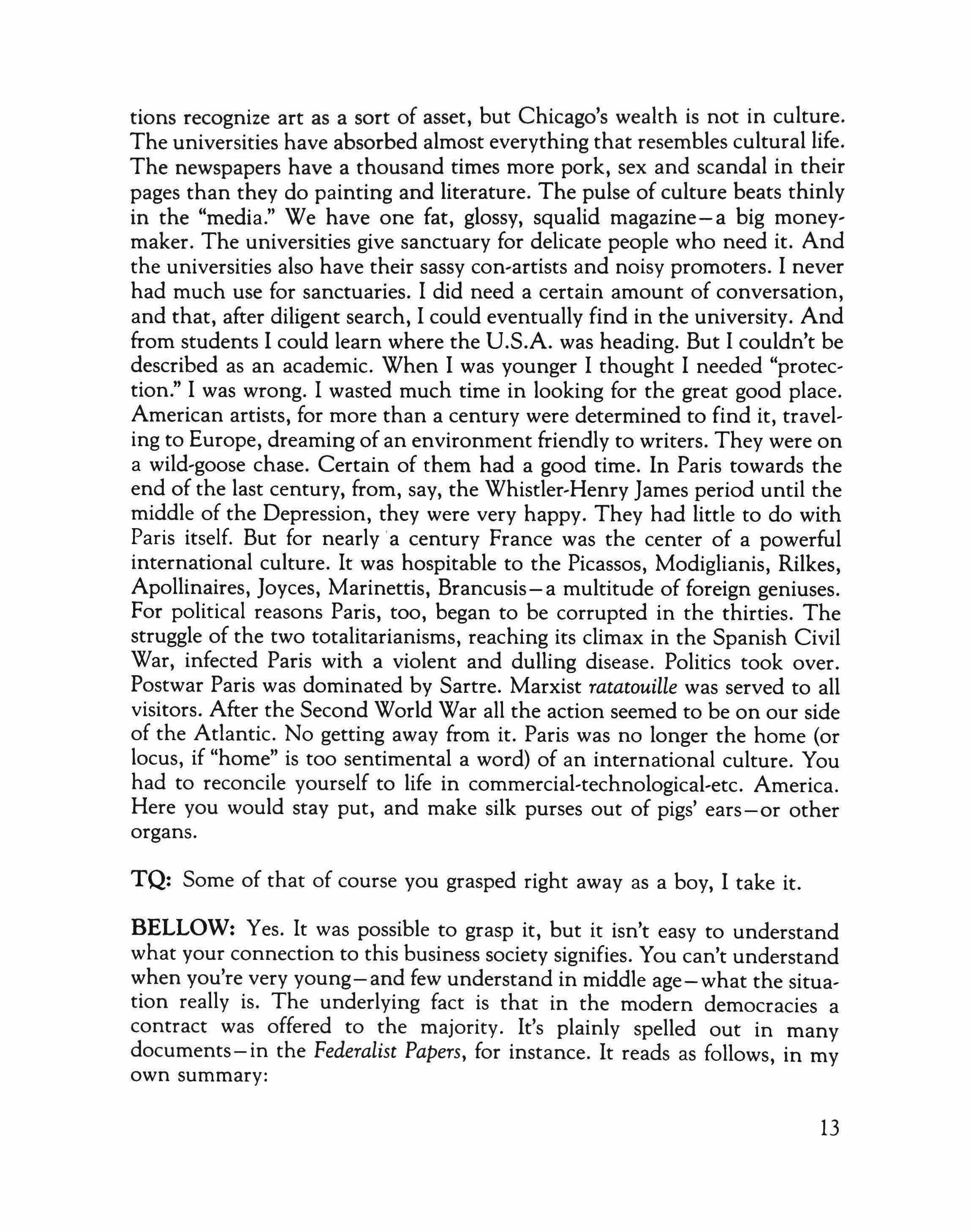
tions recognize art as a sort of asset, but Chicago's wealth is not in culture. The universities have absorbed almost everything that resembles cultural life. The newspapers have a thousand times more pork, sex and scandal in their pages than they do painting and literature. The pulse of culture beats thinly in the "media." We have one fat, glossy, squalid magazine-a big money' maker. The universities give sanctuary for delicate people who need it. And the universities also have their sassy con-artists and noisy promoters. I never had much use for sanctuaries. I did need a certain amount of conversation, and that, after diligent search, I could eventually find in the university. And from students I could learn where the U.S.A. was heading. But I couldn't be described as an academic. When I was younger I thought I needed "protection." I was wrong. I wasted much time in looking for the great good place. American artists, for more than a century were determined to find it, travel, ing to Europe, dreaming of an environment friendly to writers. They were on a wild-goose chase. Certain of them had a good time. In Paris towards the end of the last century, from, say, the Whistler,Henry James period until the middle of the Depression, they were very happy. They had little to do with Paris itself. But for nearly a century France was the center of a powerful international culture. It was hospitable to the Picassos, Modiglianis, Rilkes, Apollinaires, Joyces, Marinettis, Brancusis-a multitude of foreign geniuses. For political reasons Paris, too, began to be corrupted in the thirties. The struggle of the two totalitarianisms, reaching its climax in the Spanish Civil War, infected Paris with a violent and dulling disease. Politics took over. Postwar Paris was dominated by Sartre. Marxist ratatouille was served to all visitors. After the Second World War all the action seemed to be on our side of the Atlantic. No getting away from it. Paris was no longer the home (or locus, if "home" is too sentimental a word) of an international culture. You had to reconcile yourself to life in commercial-technological-ere. America. Here you would stay put, and make silk purses out of pigs' ears-or other organs.
TQ: Some of that of course you grasped right away as a boy, I take it.
BELLOW: Yes. It was possible to grasp it, but it isn't easy to understand what your connection to this business society signifies. You can't understand when you're very young-and few understand in middle age-what the situation really is. The underlying fact is that in the modern democracies a contract was offered to the majority. It's plainly spelled out in many documents-in the Federalist Papers, for instance. It reads as follows, in my own summary:
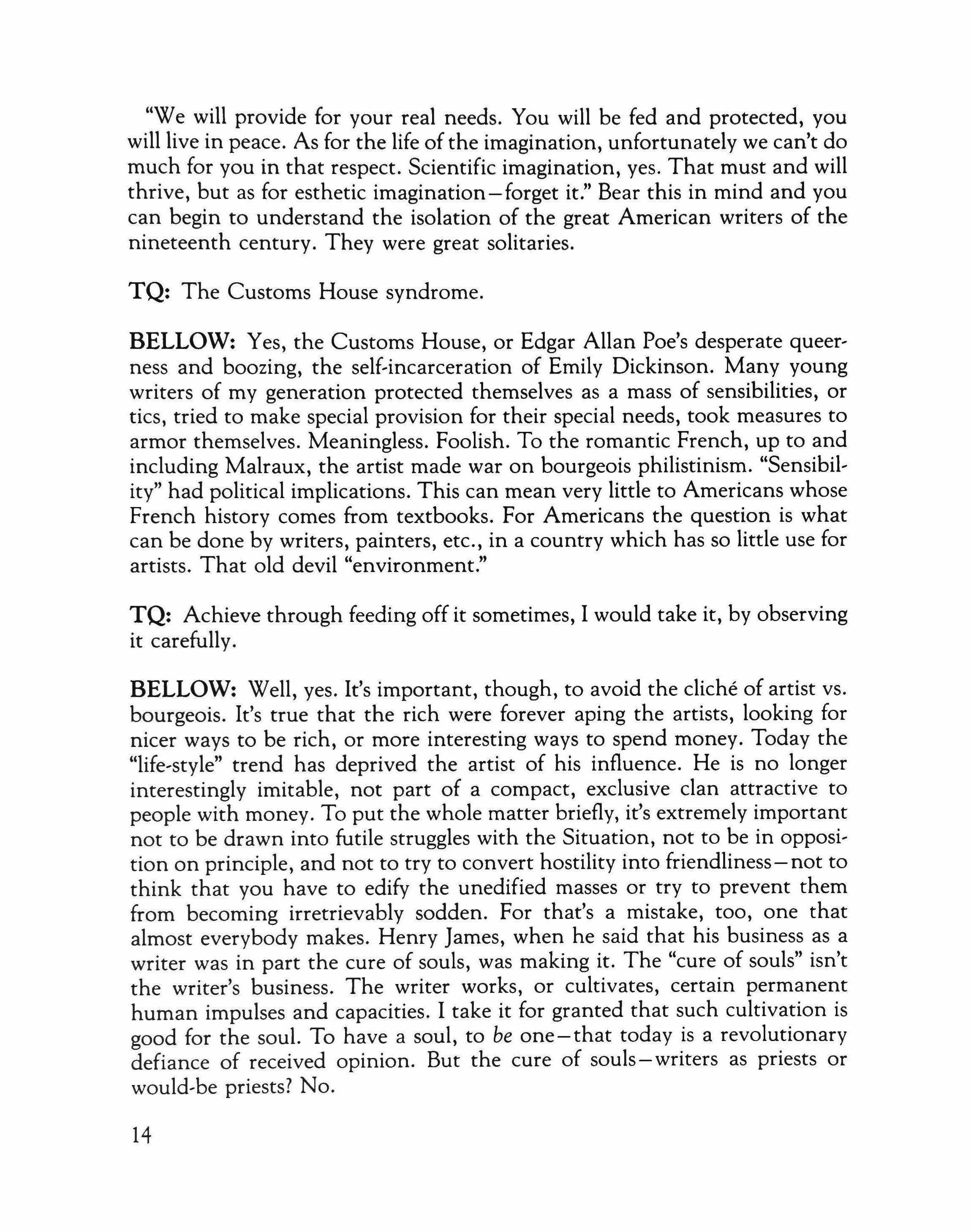
"We will provide for your real needs. You will be fed and protected, you will live in peace. As for the life of the imagination, unfortunately we can't do much for you in that respect. Scientific imagination, yes. That must and will thrive, but as for esthetic imagination-forget it." Bear this in mind and you can begin to understand the isolation of the great American writers of the nineteenth century. They were great solitaries.
TQ: The Customs House syndrome.
BELLOW: Yes, the Customs House, or Edgar Allan Poe's desperate queer, ness and boozing, the self-incarceration of Emily Dickinson. Many young writers of my generation protected themselves as a mass of sensibilities, or tics, tried to make special provision for their special needs, took measures to armor themselves. Meaningless. Foolish. To the romantic French, up to and including Malraux, the artist made war on bourgeois philistinism. "Sensibility" had political implications. This can mean very little to Americans whose French history comes from textbooks. For Americans the question is what can be done by writers, painters, etc., in a country which has so little use for artists. That old devil "environment."
TQ: Achieve through feeding off it sometimes, I would take it, by observing it carefully.
BELLOW: Well, yes. It's important, though, to avoid the cliche of artist vs. bourgeois. It's true that the rich were forever aping the artists, looking for nicer ways to be rich, or more interesting ways to spend money. Today the "life-style" trend has deprived the artist of his influence. He is no longer interestingly imitable, not part of a compact, exclusive clan attractive to people with money. To put the whole matter briefly, it's extremely important not to be drawn into futile struggles with the Situation, not to be in opposition on principle, and not to try to convert hostility into friendliness-not to think that you have to edify the unedified masses or try to prevent them from becoming irretrievably sodden. For that's a mistake, too, one that almost everybody makes. Henry James, when he said that his business as a writer was in part the cure of souls, was making it. The "cure of souls" isn't the writer's business. The writer works, or cultivates, certain permanent human impulses and capacities. I take it for granted that such cultivation is good for the soul. To have a soul, to be one-that today is a revolutionary defiance of received opinion. But the cure of souls-writers as priests or would-be priests? No.

TQ: When you talk about the would-be priests, whom are you thinking of, especially?
BELLOW: Most American writers of the nineteenth century were guides, teachers, counselors, spiritual advisors. Emerson and Thoreau preached. Whitman added illustration to preaching. He made it quite explicit that in a democracy it was the business of the poet to create models of manhood and womanhood. He did a wonderful job of it, although his models, when you find them today, are more degenerate than inspiring. Edification was big in England, too-the Carlyles, the Ruskins-Dickens, too, up to a point (of course he was freed from mere teacherism by his genius).
On the other side were the counter-edifiers who proclaimed that the condition was irredeemably decadent: the negative romantics, Baudelaire, Flaubert-Joyce, for that matter. Finally we reach the Waste Land outlookdespair over the withering of all the great things and the flourishing of all the trivial things. At this extreme, a higher edification is invoked, or hinted at, or prayed for. Democrats, naturally, were edifiers. The anti-edifiers were, as writers, more powerful. The nihilists expressed what the majority of civilized mankind thought and felt. They were more truly representative than the edifiers, hence their greater power.
TQ: You mean that the doctrines of the edifiers have worn too thin or that the current fix is simply an impossible one to address?
BELLOW: Well, writers don't seem to understand the situation. Not long ago I picked up Junkie by William Burroughs. He states in the introduction that his purpose in writing the book is to warn people about narcotics. Well, people won't read him for the moral lesson. They want to know about dope. But one must edify. Even Burroughs accepts that rule.
TQ: You mentioned that the writer is ignored in this country. Does this help the writer insofar as he is thus unencumbered, that he doesn't have to live up to any particular standards?
BELLOW: It helps if he isn't damaged, if his feelings aren't too badly crushed. One needs some attention. It's all or nothing in the U.S., and if you don't make the celebrity circuit you are wretchedly ignored.
TQ: The would-be edifiers as well?
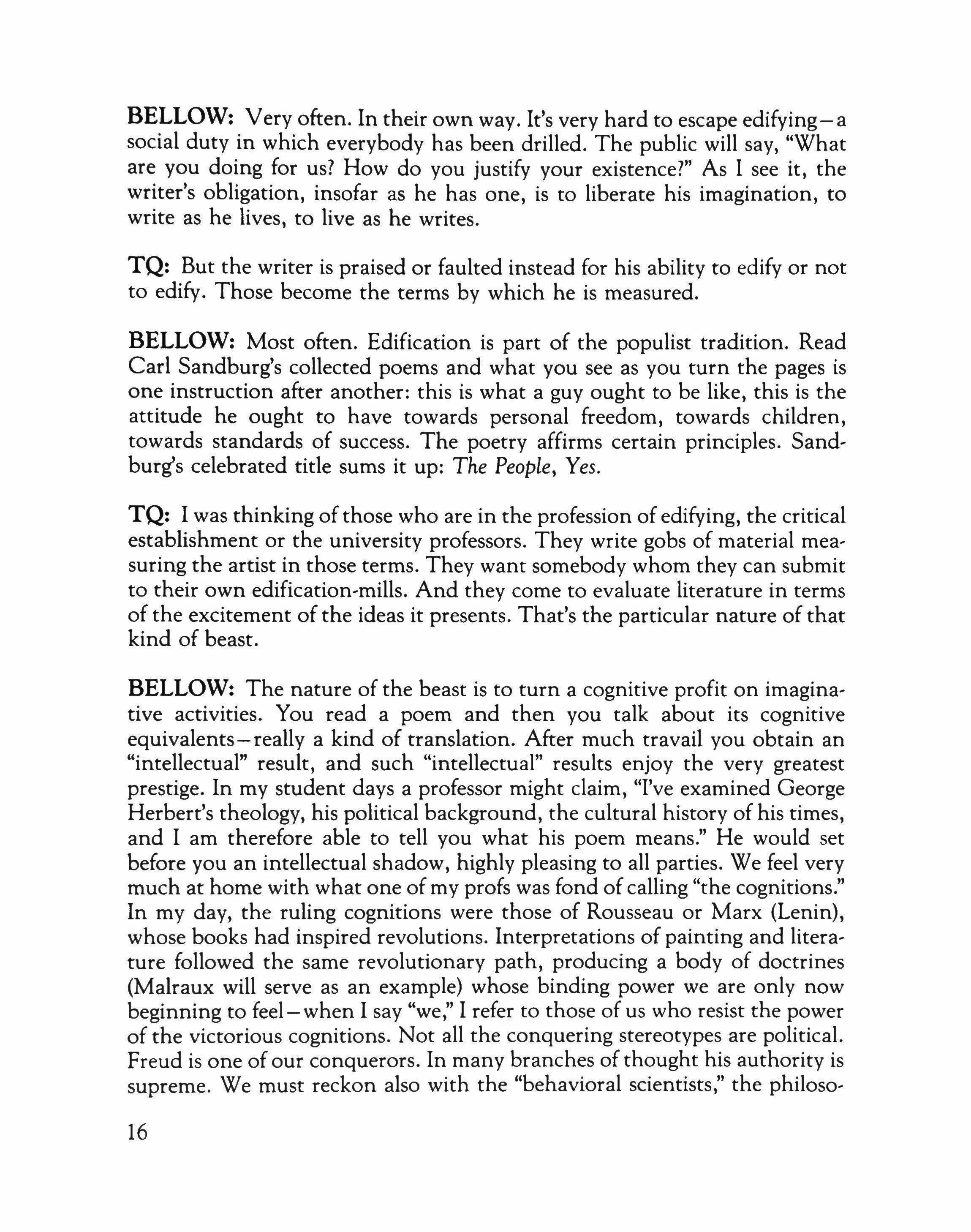
BELLOW: Very often. In their own way. It's very hard to escape edifying-a social duty in which everybody has been drilled. The public will say, "What are you doing for us? How do you justify your existence?" As I see it, the writer's obligation, insofar as he has one, is to liberate his imagination, to write as he lives, to live as he writes.
TQ: But the writer is praised or faulted instead for his ability to edify or not to edify. Those become the terms by which he is measured.
BELLOW: Most often. Edification is part of the populist tradition. Read Carl Sandburg's collected poems and what you see as you turn the pages is one instruction after another: this is what a guy ought to be like, this is the attitude he ought to have towards personal freedom, towards children, towards standards of success. The poetry affirms certain principles. Sand, burg's celebrated title sums it up: The People, Yes.
TQ: I was thinking ofthose who are in the profession of edifying, the critical establishment or the university professors. They write gobs of material mea' suring the artist in those terms. They want somebody whom they can submit to their own edification-mills. And they come to evaluate literature in terms of the excitement of the ideas it presents. That's the particular nature of that kind of beast.
BELLOW: The nature of the beast is to turn a cognitive profit on imaginative activities. You read a poem and then you talk about its cognitive equivalents-really a kind of translation. After much travail you obtain an "intellectual" result, and such "intellectual" results enjoy the very greatest prestige. In my student days a professor might claim, "I've examined George Herbert's theology, his political background, the cultural history of his times, and I am therefore able to tell you what his poem means." He would set before you an intellectual shadow, highly pleasing to all parties. We feel very much at home with what one of my profs was fond of calling "the cognitions." In my day, the ruling cognitions were those of Rousseau or Marx (Lenin), whose books had inspired revolutions. Interpretations of painting and litera, ture followed the same revolutionary path, producing a body of doctrines (Malraux will serve as an example) whose binding power we are only now beginning to feel-when I say "we," I refer to those of us who resist the power of the victorious cognitions. Not all the conquering stereotypes are political. Freud is one of our conquerors. In many branches of thought his authority is supreme. We must reckon also with the "behavioral scientists," the philoso-

phers (existentialists and logical positivists), historians, theologians - bands of academics, critics and pundits, creators of "schools." Taken altogether, the body of "thought" created by these "intellectuals" is a huge affliction. Its effects are deadly. Few are strong enough to ward them off. Writers can't afford to draw their premises from this stock of"ideas" - idees re�es is a more suitable expression. The unhappy fact is, however, that they do-even the best of them draw major premises from the cliche stockpile. "Are you an Antihumanist, Brother? Have you squared yourself with Malraux? With the Structuralists? Are you on truly bad terms with the prevailing ethos?" You couldn't be a real writer if you hadn't estranged yourself from the culture and the society of your time.
Whereas the older generation of academics were sworn edifiers, their younger successors are proud of their "estrangement." They enjoy the esthetic prestige of the "estranged" (the only real) "artist." At the same time, they control the departments (philosophy, English, etc.) in which they have ten, ured appointments. In the name of "deconstruction," they have taken over not only these departments, but literature itself, operating in the cockpit side by side with Shakespeare, Milton, etc., as copilots. These academics-good God! Suppose that a dwarf sitting in Shakespeare's lap were to imagine that he was piloting the great Shakespearean jet!
TQ: We came quite a way from the original question about the city as metaphor. Is there any interest in picking up that original thread, or not?
BELLOW: Yes, why not? I've spent most of my life in Chicago. A glance from the window in the morning is enough to set off endless trains of associations. The weather alone will do it - sixty years of chill, darkness, rain, ice, smoke, winter blue, summer blue. Structural steel or the brick walls of six-flats send messages to me. Inevitably, you invest your vital substance in familiar surroundings. That's why they are called "familiar." Chicago is one of the larger provinces of my psychic life. I refer, of course, to the old Chicago, which is now in full decay. A new, proud, synthetic Chicago has begun to spread outwards from the Loop.
TQ: You seem to suggest that it's simply an accident that you wound up in Chicago, that although Chicago has certain associations for you there is nothing unique about it. Some kind of vitality ?
BELLOW: I was brought here by my parents at the age of nine. Accident? I am reluctant to speak of"my karma." Yet I do sometimes feel that I was stuck
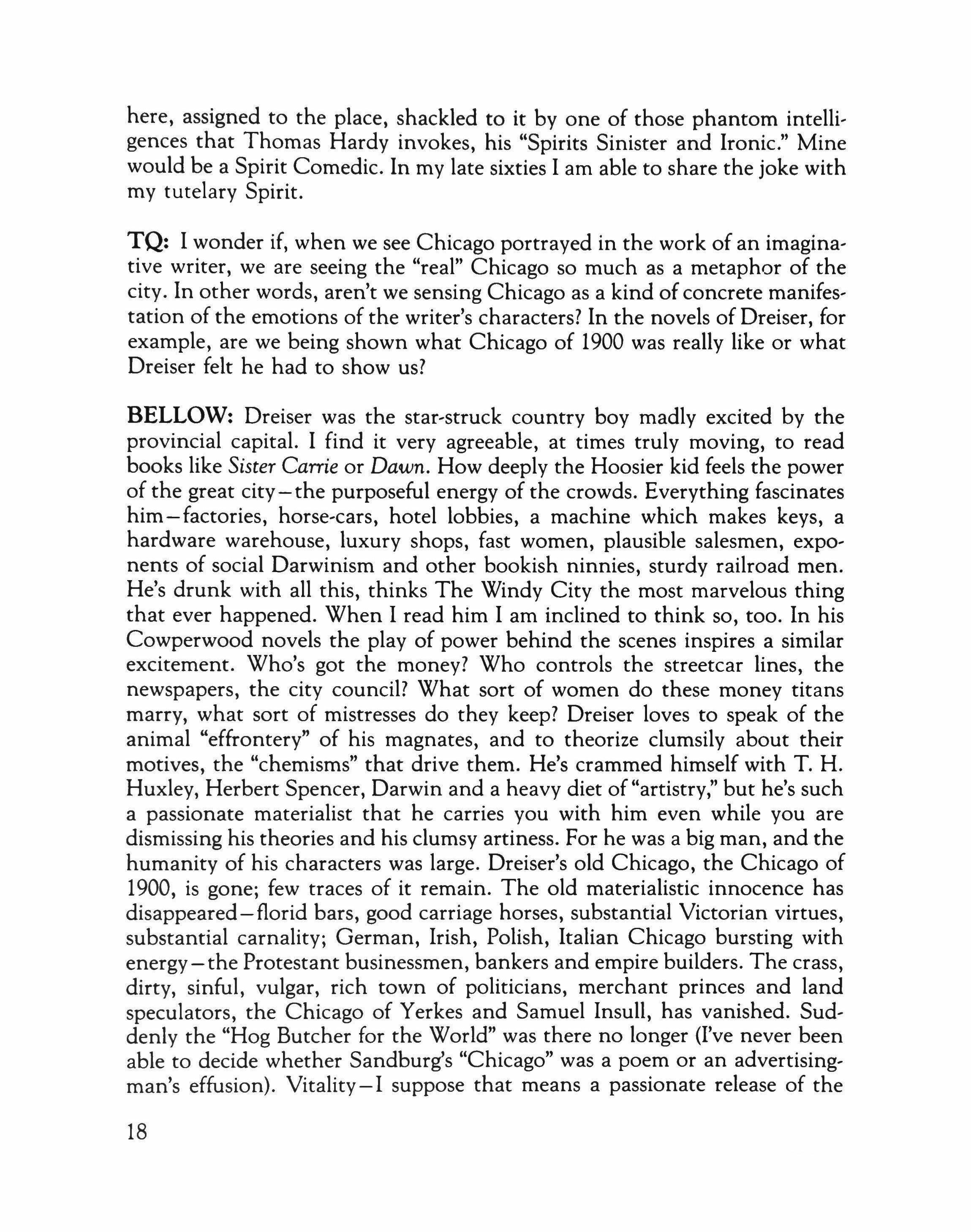
here, assigned to the place, shackled to it by one of those phantom intelligences that Thomas Hardy invokes, his "Spirits Sinister and Ironic." Mine would be a Spirit Comedic. In my late sixties I am able to share the joke with my tutelary Spirit.
TQ: I wonder if, when we see Chicago portrayed in the work of an imaginative writer, we are seeing the "real" Chicago so much as a metaphor of the city. In other words, aren't we sensing Chicago as a kind of concrete manifestation of the emotions of the writer's characters? In the novels of Dreiser, for example, are we being shown what Chicago of 1900 was really like or what Dreiser felt he had to show us?
BELLOW: Dreiser was the star-struck country boy madly excited by the provincial capital. I find it very agreeable, at times truly moving, to read books like Sister Carrie or Dawn. How deeply the Hoosier kid feels the power of the great city-the purposeful energy of the crowds. Everything fascinates him - factories, horse-cars, hotel lobbies, a machine which makes keys, a hardware warehouse, luxury shops, fast women, plausible salesmen, expo' nents of social Darwinism and other bookish ninnies, sturdy railroad men. He's drunk with all this, thinks The Windy City the most marvelous thing that ever happened. When I read him I am inclined to think so, too. In his Cowperwood novels the play of power behind the scenes inspires a similar excitement. Who's got the money? Who controls the streetcar lines, the newspapers, the city council? What sort of women do these money titans marry, what sort of mistresses do they keep? Dreiser loves to speak of the animal "effrontery" of his magnates, and to theorize clumsily about their motives, the "chemisms" that drive them. He's crammed himself with T. H. Huxley, Herbert Spencer, Darwin and a heavy diet of"artistry," but he's such a passionate materialist that he carries you with him even while you are dismissing his theories and his clumsy artiness. For he was a big man, and the humanity of his characters was large. Dreiser's old Chicago, the Chicago of 1900, is gone; few traces of it remain. The old materialistic innocence has disappeared - florid bars, good carriage horses, substantial Victorian virtues, substantial carnality; German, Irish, Polish, Italian Chicago bursting with energy - the Protestant businessmen, bankers and empire builders. The crass, dirty, sinful, vulgar, rich town of politicians, merchant princes and land speculators, the Chicago of Yerkes and Samuel Insull, has vanished. Sud, denly the "Hog Butcher for the World" was there no longer (I've never been able to decide whether Sandburg's "Chicago" was a poem or an advertising, man's effusion). Vitality-I suppose that means a passionate release of the
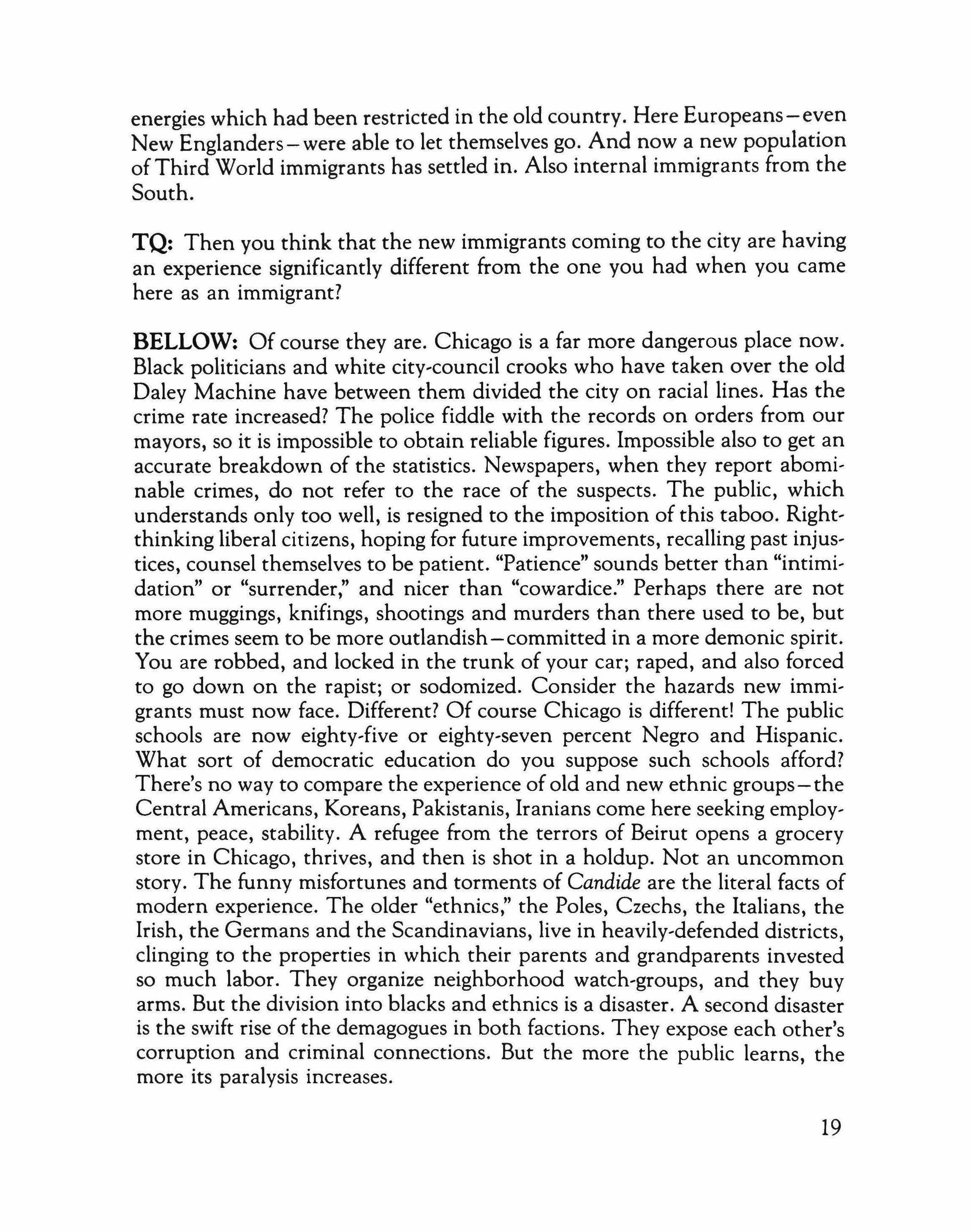
energies which had been restricted in the old country. Here Europeans-even New Englanders - were able to let themselves go. And now a new population ofThird World immigrants has settled in. Also internal immigrants from the South.
TQ: Then you think that the new immigrants coming to the city are having an experience significantly different from the one you had when you came here as an immigrant?
BELLOW: Of course they are. Chicago is a far more dangerous place now. Black politicians and white city-council crooks who have taken over the old Daley Machine have between them divided the city on racial lines. Has the crime rate increased? The police fiddle with the records on orders from our mayors, so it is impossible to obtain reliable figures. Impossible also to get an accurate breakdown of the statistics. Newspapers, when they report aborninable crimes, do not refer to the race of the suspects. The public, which understands only too well, is resigned to the imposition of this taboo. Right, thinking liberal citizens, hoping for future improvements, recalling past injustices, counsel themselves to be patient. "Patience" sounds better than "intimidation" or "surrender," and nicer than "cowardice." Perhaps there are not more muggings, knifings, shootings and murders than there used to be, but the crimes seem to be more outlandish - committed in a more demonic spirit. You are robbed, and locked in the trunk of your car; raped, and also forced to go down on the rapist; or sodomized. Consider the hazards new immigrants must now face. Different? Of course Chicago is different! The public schools are now eighty-five or eighty-seven percent Negro and Hispanic. What sort of democratic education do you suppose such schools afford? There's no way to compare the experience of old and new ethnic groups-the Central Americans, Koreans, Pakistanis, Iranians come here seeking employ, ment, peace, stability. A refugee from the terrors of Beirut opens a grocery store in Chicago, thrives, and then is shot in a holdup. Not an uncommon story. The funny misfortunes and torments of Candide are the literal facts of modern experience. The older "ethnics," the Poles, Czechs, the Italians, the Irish, the Germans and the Scandinavians, live in heavily-defended districts, clinging to the properties in which their parents and grandparents invested so much labor. They organize neighborhood watch-groups, and they buy arms. But the division into blacks and ethnics is a disaster. A second disaster is the swift rise of the demagogues in both factions. They expose each other's corruption and criminal connections. But the more the public learns, the more its paralysis increases.
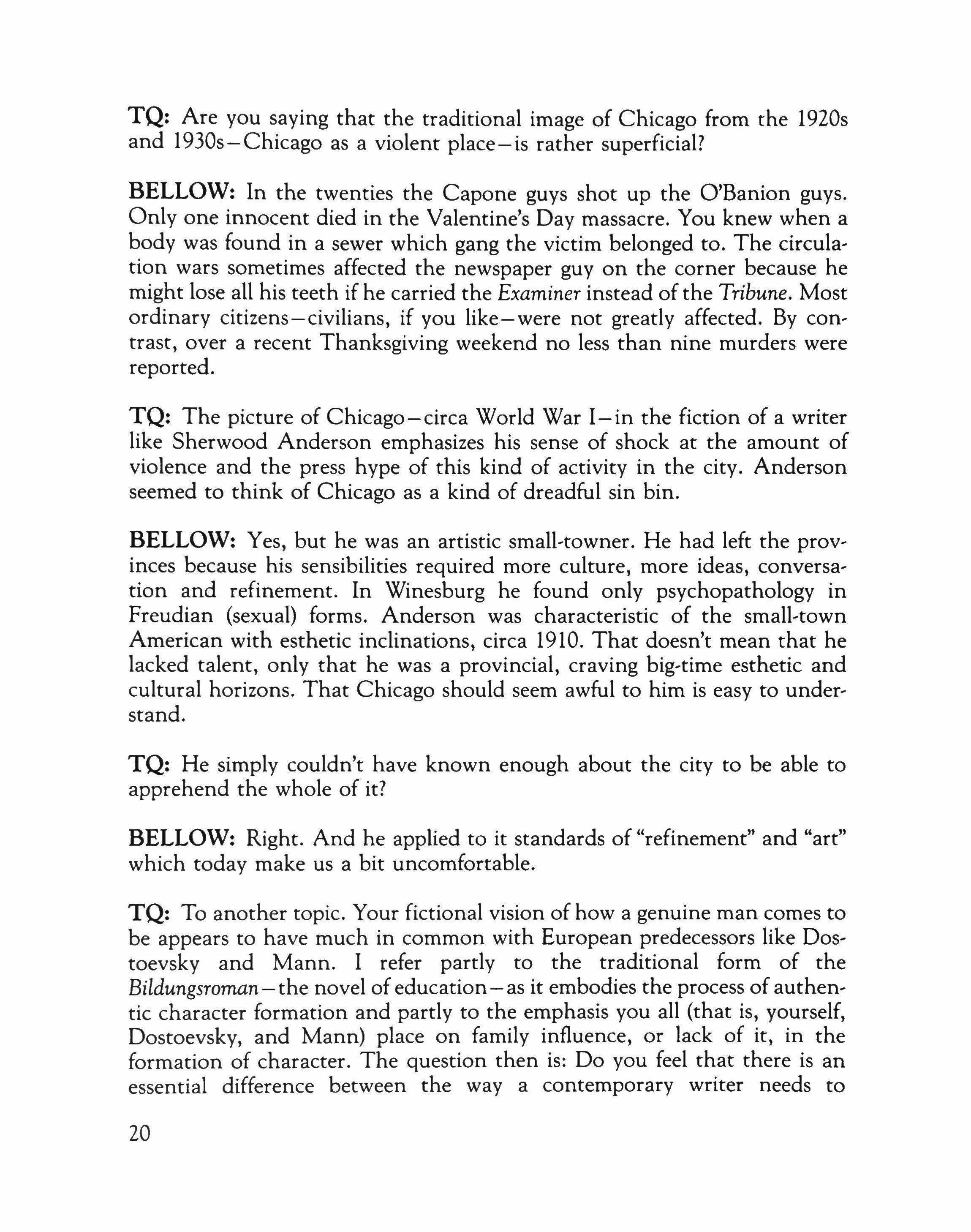
TQ: Are you saying that the traditional image of Chicago from the 1920s and 1930s-Chicago as a violent place-is rather superficial?
BELLOW: In the twenties the Capone guys shot up the O'Banion guys. Only one innocent died in the Valentine's Day massacre. You knew when a body was found in a sewer which gang the victim belonged to. The circulation wars sometimes affected the newspaper guy on the corner because he might lose all his teeth if he carried the Examiner instead of the Tribune. Most ordinary citizens-civilians, if you like-were not greatly affected. By contrast, over a recent Thanksgiving weekend no less than nine murders were reported.
TQ: The picture of Chicago-circa World War I-in the fiction of a writer like Sherwood Anderson emphasizes his sense of shock at the amount of violence and the press hype of this kind of activity in the city. Anderson seemed to think of Chicago as a kind of dreadful sin bin.
BELLOW: Yes, but he was an artistic small-towner. He had left the provinces because his sensibilities required more culture, more ideas, conversation and refinement. In Winesburg he found only psychopathology in Freudian (sexual) forms. Anderson was characteristic of the small-town American with esthetic inclinations, circa 1910. That doesn't mean that he lacked talent, only that he was a provincial, craving big-time esthetic and cultural horizons. That Chicago should seem awful to him is easy to understand.
TQ: He simply couldn't have known enough about the city to be able to apprehend the whole of it?
BELLOW: Right. And he applied to it standards of "refinement" and "art" which today make us a bit uncomfortable.
TQ: To another topic. Your fictional vision of how a genuine man comes to be appears to have much in common with European predecessors like Dostoevsky and Mann. I refer partly to the traditional form of the Bildungsroman - the novel ofeducation - as it embodies the process of authentic character formation and partly to the emphasis you all (that is, yourself, Dostoevsky, and Mann) place on family influence, or lack of it, in the formation of character. The question then is: Do you feel that there is an essential difference between the way a contemporary writer needs to

approach the problem, "How do I live genuinely?" and the way such earlier writers as Dostoevsky and Mann approached that problem?
BELLOW: First of all, I would make a distinction between Dostoevsky and anybody else because he was the greater writer by far, a man struggling to justify his Christianity against his own skepticism and nihilism. Mann was more ready to play; rather, to make a game of examining the bourgeoisie against a background of nihilism, and to exploit the opportunities for historical painting that this offered. In Buddenbrooks the bourgeois order in which the family had been rooted was decaying, falling into pessimism (Schopenhauer) and decadence. My own situation was that of a person who early understood that, like it or not, he was an exotic among other exotics. The children of immigrants inherited no "bourgeois stability." This may be a little difficult to interpret. Stability, if we were to have any, must be found or created. The word for this was "Americanization." The masses that came from Europe in the great wave of immigration between 1870 and 1930 wanted to be as American as possible. I was quick to recognize how hard the immigrants were trying to be something that they were not. They had excellent reasons for making themselves over. The distortions they suffered in Americanizing themselves also charged them with a certain energy. It was this energy that built the great cities. "Traditionalists" dislikedno, despised-this, but what American cities did "tradition" build? When FDR said on the air one night during a Fireside Chat that we are all aliens here, that this was a nation of aliens, he could safely, generously, advantageously, say it because he obviously was not an alien. He was a rich country squire who belonged to a famous family, but he was picking up a lot of votes by speaking plainly about the others. Though everybody wished to be an American, everybody's secret was that he hadn't succeeded in becoming one. My friend Lillian McCall, in her forthcoming memoirs, develops this theme in an original manner. The immigrant might have changed his name and his clothing and denied his native Italian or Russian or Yiddish, but the mark of the alien was upon him-you could see it. I picked that up, and that's why I don't know whether a book like The Adventures ofAugie March is so much a Bildungsroman as it is a piece of ethnography. And I understand now why Augie March himself was such an ingenu: he didn't want to acknowledge the worst; the fact is, he wanted to enjoy his situation, wanted to play the American naif. There was a price to pay. He was unwilling to pay it.
TQ: Paying for it would have meant recognizing the unfinished quality of his world?
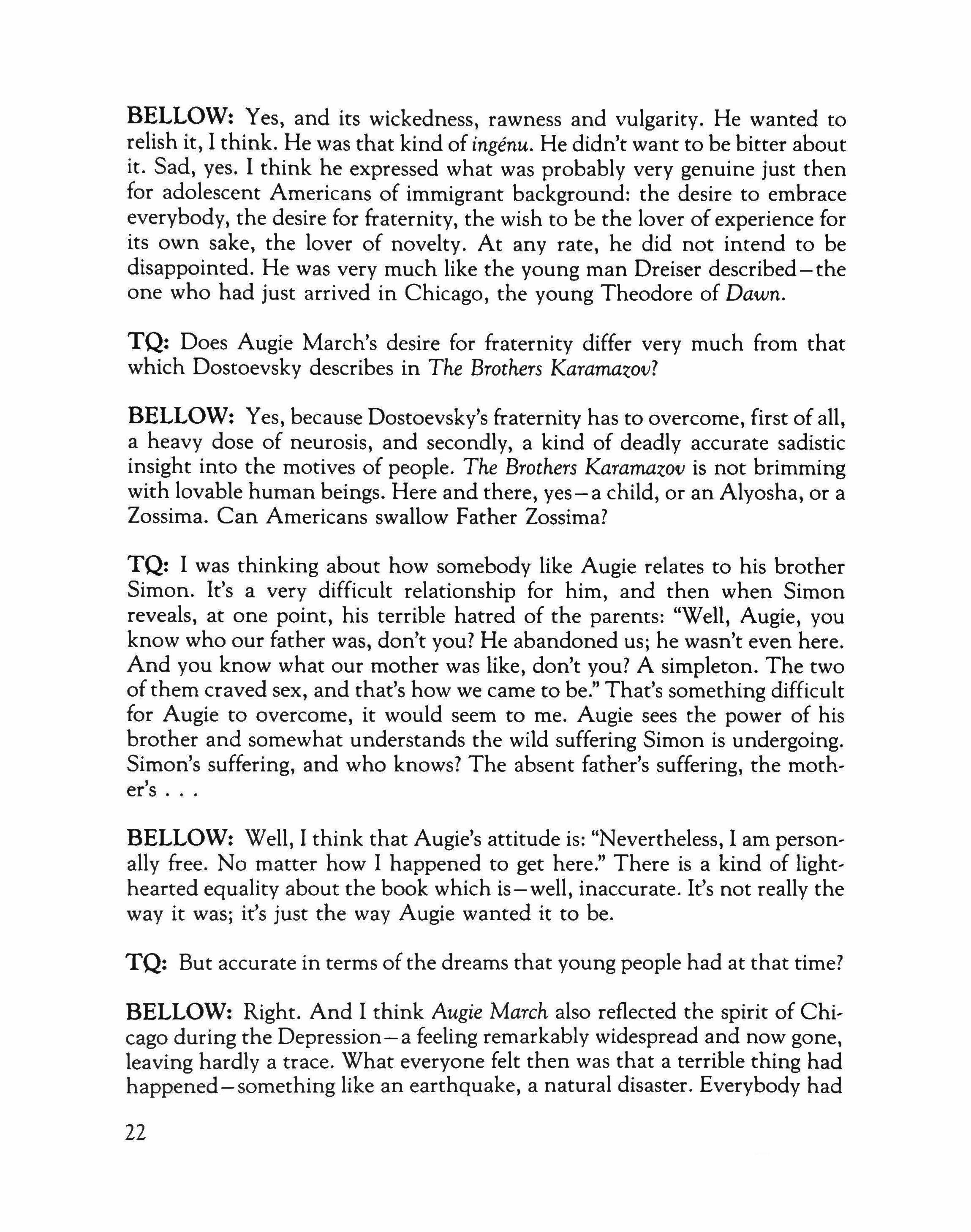
BELLOW: Yes, and its wickedness, rawness and vulgarity. He wanted to relish it, I think. He was that kind of ingenu. He didn't want to be bitter about it. Sad, yes. I think he expressed what was probably very genuine just then for adolescent Americans of immigrant background: the desire to embrace everybody, the desire for fraternity, the wish to be the lover of experience for its own sake, the lover of novelty. At any rate, he did not intend to be disappointed. He was very much like the young man Dreiser described - the one who had just arrived in Chicago, the young Theodore of Dawn.
TQ: Does Augie March's desire for fraternity differ very much from that which Dostoevsky describes in The Brothers Karamazov?
BELLOW: Yes, because Dostoevsky's fraternity has to overcome, first of all, a heavy dose of neurosis, and secondly, a kind of deadly accurate sadistic insight into the motives of people. The Brothers Karamazov is not brimming with lovable human beings. Here and there, yes-a child, or an Alyosha, or a Zossima. Can Americans swallow Father Zossima?
TQ: I was thinking about how somebody like Augie relates to his brother Simon. It's a very difficult relationship for him, and then when Simon reveals, at one point, his terrible hatred of the parents: "Well, Augie, you know who our father was, don't you? He abandoned us; he wasn't even here. And you know what our mother was like, don't you? A simpleton. The two of them craved sex, and that's how we came to be." That's something difficult for Augie to overcome, it would seem to me. Augie sees the power of his brother and somewhat understands the wild suffering Simon is undergoing. Simon's suffering, and who knows? The absent father's suffering, the moth, ers
BELLOW: Well, I think that Augie's attitude is: "Nevertheless, I am person, ally free. No matter how I happened to get here." There is a kind of light, hearted equality about the book which is-well, inaccurate. It's not really the way it was; it's just the way Augie wanted it to be.
TQ: But accurate in terms of the dreams that young people had at that time?
BELLOW: Right. And I think Augie March also reflected the spirit of Chi, cago during the Depression-a feeling remarkably widespread and now gone, leaving hardly a trace. What everyone felt then was that a terrible thing had happened-something like an earthquake, a natural disaster. Everybody had
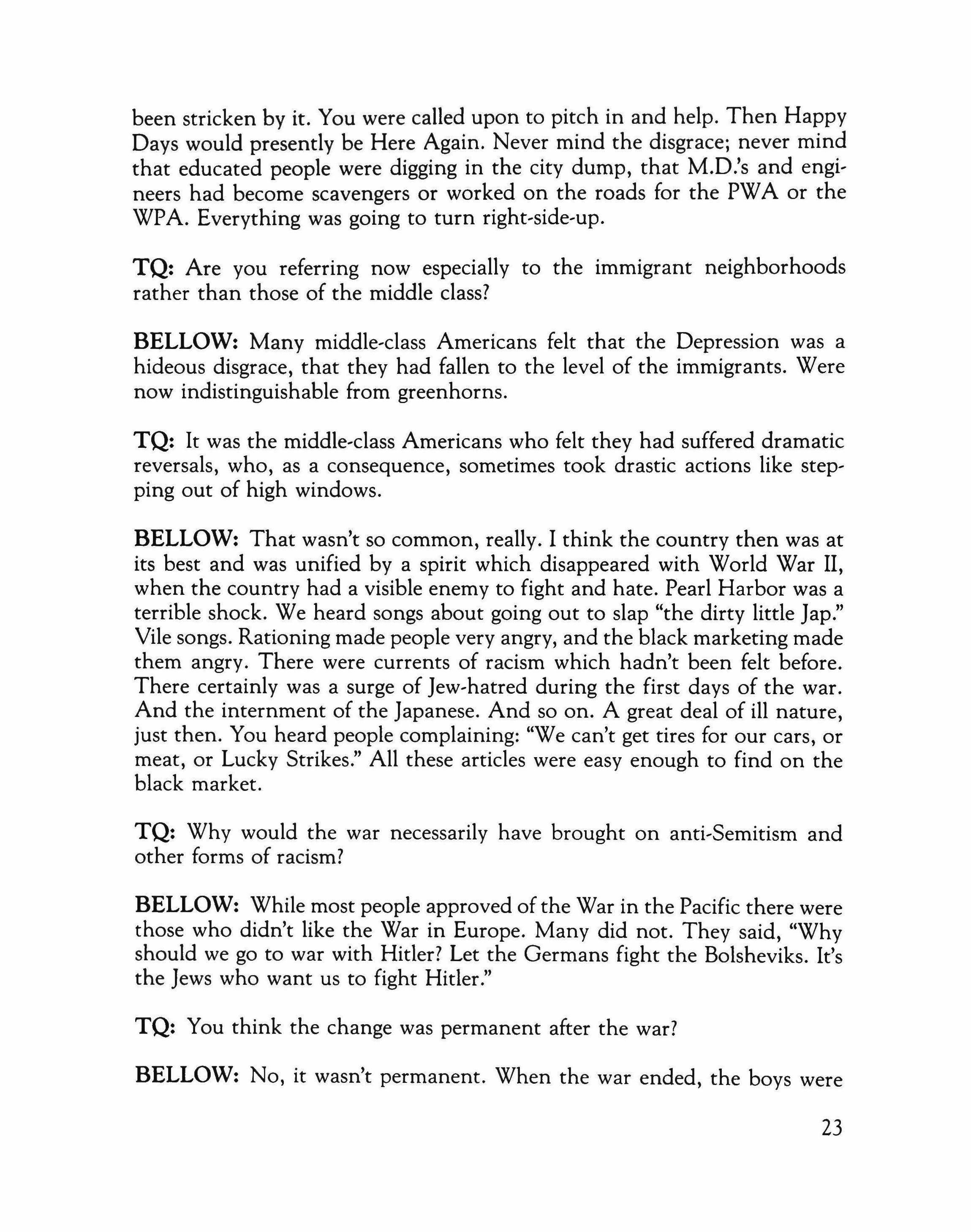
been stricken by it. You were called upon to pitch in and help. Then Happy Days would presently be Here Again. Never mind the disgrace; never mind that educated people were digging in the city dump, that M.D.'s and engineers had become scavengers or worked on the roads for the PWA or the WPA. Everything was going to turn right-side-up.
TQ: Are you referring now especially to the immigrant neighborhoods rather than those of the middle class?
BELLOW: Many middle-class Americans felt that the Depression was a hideous disgrace, that they had fallen to the level of the immigrants. Were now indistinguishable from greenhorns.
TQ: It was the middle-class Americans who felt they had suffered dramatic reversals, who, as a consequence, sometimes took drastic actions like step� ping out of high windows.
BELLOW: That wasn't so common, really. I think the country then was at its best and was unified by a spirit which disappeared with World War II, when the country had a visible enemy to fight and hate. Pearl Harbor was a terrible shock. We heard songs about going out to slap "the dirty little Jap." Vile songs. Rationing made people very angry, and the black marketing made them angry. There were currents of racism which hadn't been felt before. There certainly was a surge of jew-hatred during the first days of the war. And the internment of the Japanese. And so on. A great deal of ill nature, just then. You heard people complaining: "We can't get tires for our cars, or meat, or Lucky Strikes." All these articles were easy enough to find on the black market.
TQ: Why would the war necessarily have brought on anti-Semitism and other forms of racism?
BELLOW: While most people approved of the War in the Pacific there were those who didn't like the War in Europe. Many did not. They said, "Why should we go to war with Hitler? Let the Germans fight the Bolsheviks. It's the Jews who want us to fight Hitler."
TQ: You think the change was permanent after the war?
BELLOW: No, it wasn't permanent. When the war ended, the boys were
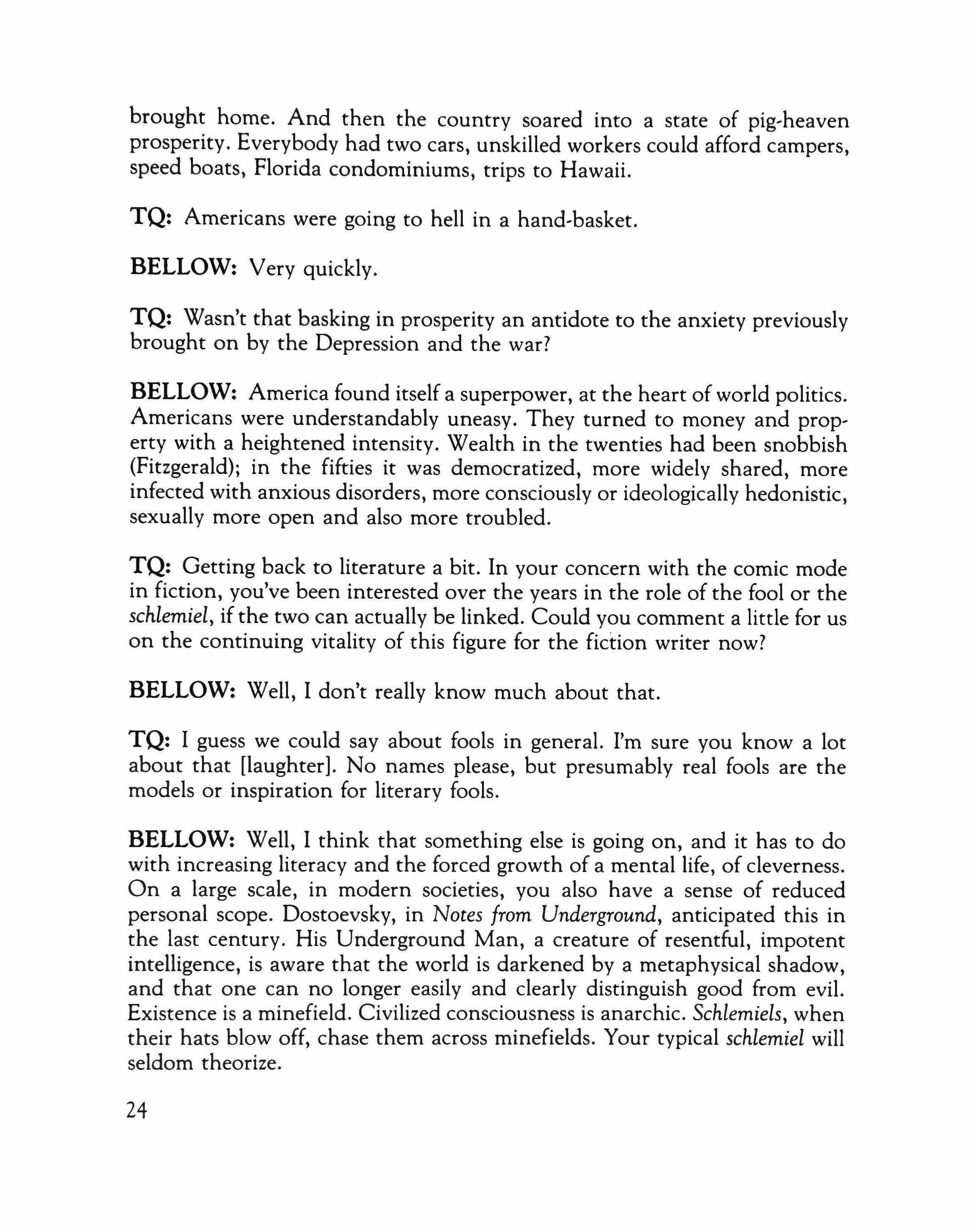
brought home. And then the country soared into a state of pig-heaven prosperity. Everybody had two cars, unskilled workers could afford campers, speed boats, Florida condominiums, trips to Hawaii.
TQ: Americans were going to hell in a hand-basket.
BELLOW: Very quickly.
TQ: Wasn't that basking in prosperity an antidote to the anxiety previously brought on by the Depression and the war?
BELLOW: America found itself a superpower, at the heart of world politics. Americans were understandably uneasy. They turned to money and property with a heightened intensity. Wealth in the twenties had been snobbish (Fitzgerald); in the fifties it was democratized, more widely shared, more infected with anxious disorders, more consciously or ideologically hedonistic, sexually more open and also more troubled.
TQ: Getting back to literature a bit. In your concern with the comic mode in fiction, you've been interested over the years in the role of the fool or the schlemiel, if the two can actually be linked. Could you comment a little for us on the continuing vitality of this figure for the fiction writer now?
BELLOW: Well, I don't really know much about that.
TQ: I guess we could say about fools in general. I'm sure you know a lot about that [laughter]. No names please, but presumably real fools are the models or inspiration for literary fools.
BELLOW: Well, I think that something else is going on, and it has to do with increasing literacy and the forced growth of a mental life, of cleverness. On a large scale, in modern societies, you also have a sense of reduced personal scope. Dostoevsky, in Notes from Underground, anticipated this in the last century. His Underground Man, a creature of resentful, impotent intelligence, is aware that the world is darkened by a metaphysical shadow, and that one can no longer easily and clearly distinguish good from evil. Existence is a minefield. Civilized consciousness is anarchic. Schlemiels, when their hats blow off, chase them across minefields. Your typical schlemiel will seldom theorize.
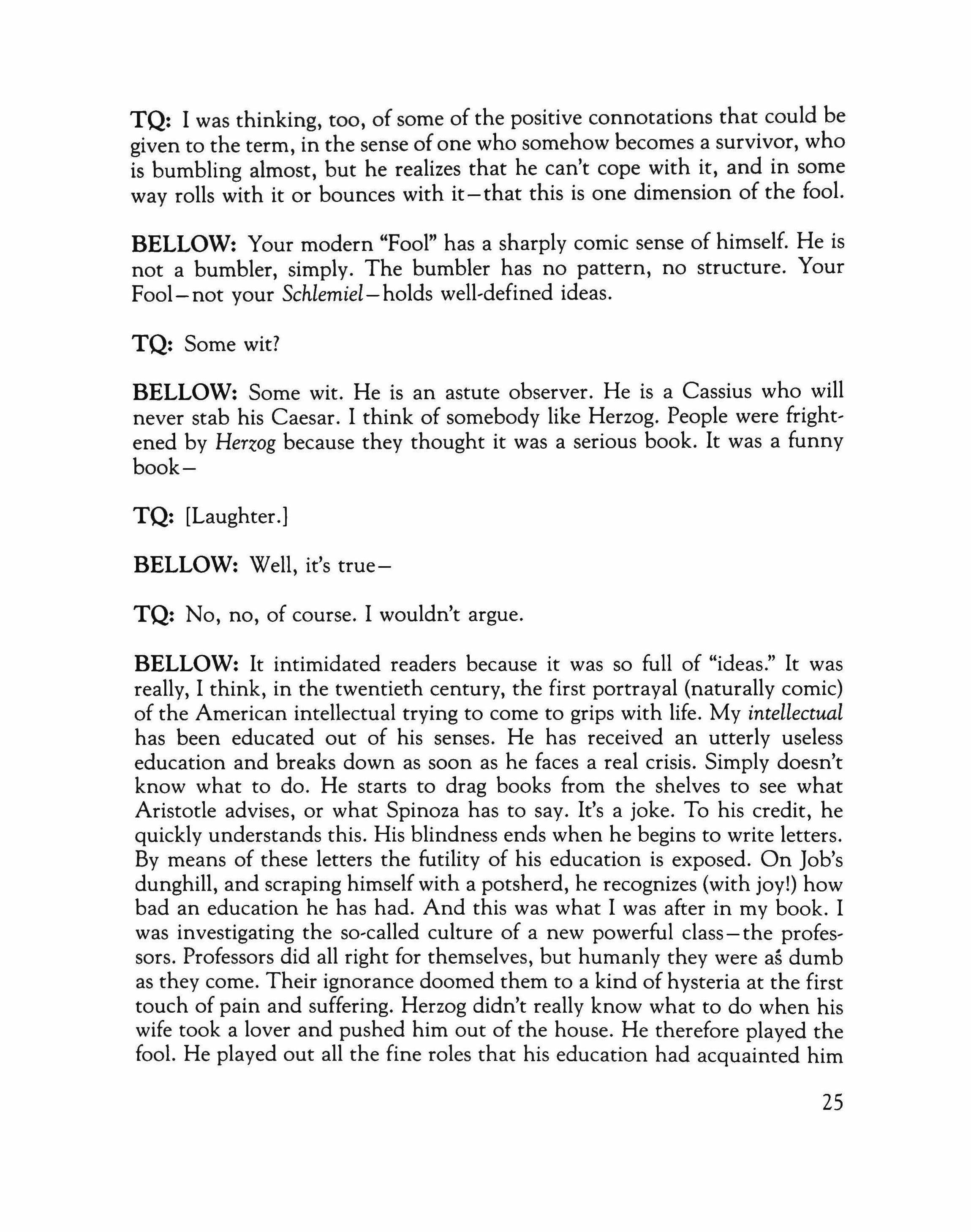
TQ: I was thinking, too, of some of the positive connotations that could be given to the term, in the sense of one who somehow becomes a survivor, who is bumbling almost, but he realizes that he can't cope with it, and in some way rolls with it or bounces with it - that this is one dimension of the fool.
BELLOW: Your modern "Fool" has a sharply comic sense of himself. He is not a bumbler, simply. The bumbler has no pattern, no structure. Your Fool-not your Schlemiel-holds well-defined ideas.
TQ: Some wit?
BELLOW: Some wit. He is an astute observer. He is a Cassius who will never stab his Caesar. I think of somebody like Herzog. People were frightened by Herzog because they thought it was a serious book. It was a funny book-
TQ: [Laughter.]
BELLOW: Well, it's true-
TQ: No, no, of course. I wouldn't argue.
BELLOW: It intimidated readers because it was so full of "ideas." It was really, I think, in the twentieth century, the first portrayal (naturally comic) of the American intellectual trying to come to grips with life. My intellectual has been educated out of his senses. He has received an utterly useless education and breaks down as soon as he faces a real crisis. Simply doesn't know what to do. He starts to drag books from the shelves to see what Aristotle advises, or what Spinoza has to say. It's a joke. To his credit, he quickly understands this. His blindness ends when he begins to write letters. By means of these letters the futility of his education is exposed. On Job's dunghill, and scraping himself with a potsherd, he recognizes (with joy!) how bad an education he has had. And this was what I was after in my book. I was investigating the so-called culture of a new powerful class-the professors. Professors did all right for themselves, but humanly they were as dumb as they come. Their ignorance doomed them to a kind of hysteria at the first touch of pain and suffering. Herzog didn't really know what to do when his wife took a lover and pushed him out of the house. He therefore played the fool. He played out all the fine roles that his education had acquainted him
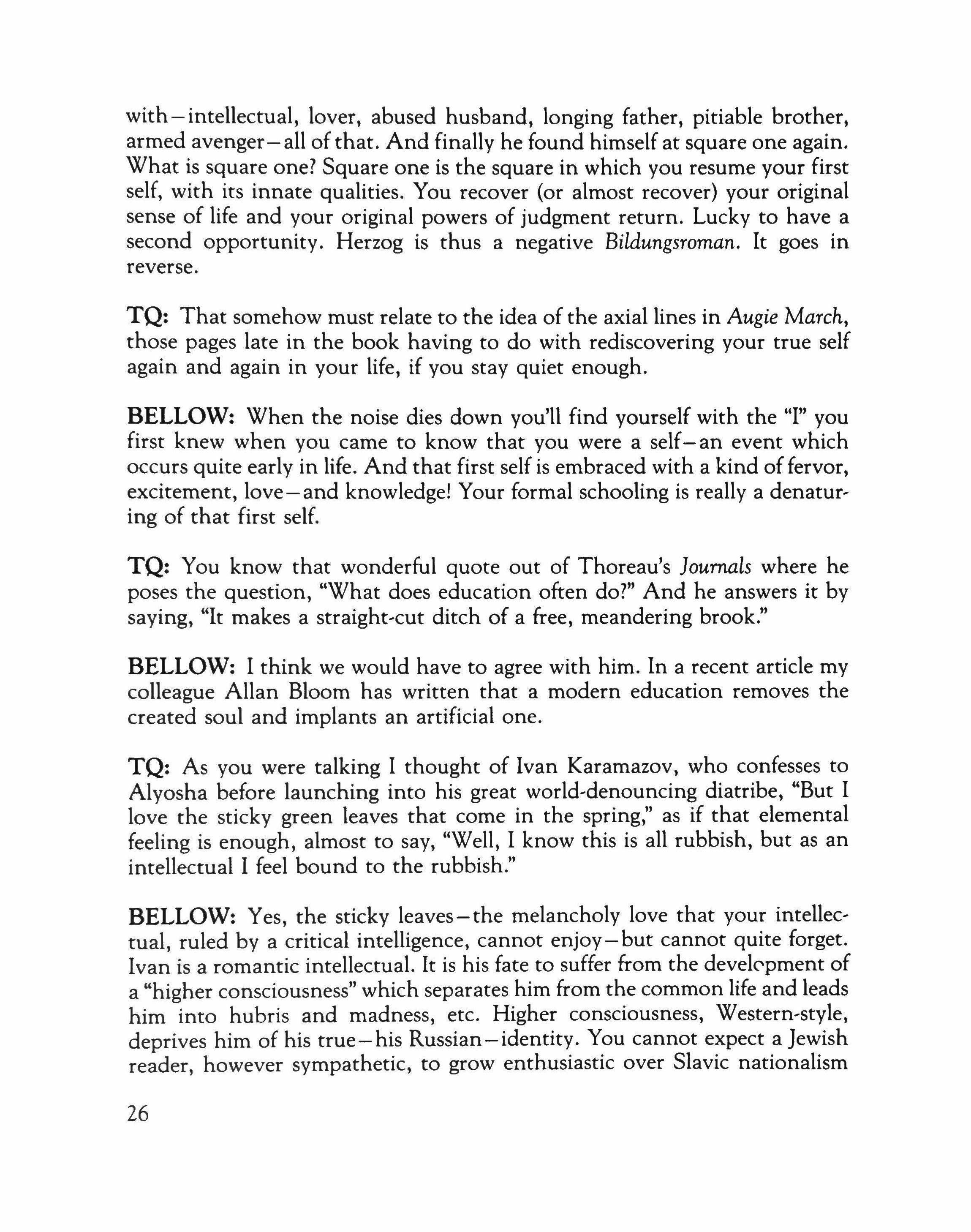
with-intellectual, lover, abused husband, longing father, pitiable brother, armed avenger-all of that. And finally he found himself at square one again. What is square one? Square one is the square in which you resume your first self, with its innate qualities. You recover (or almost recover) your original sense of life and your original powers of judgment return. Lucky to have a second opportunity. Herzog is thus a negative Bildungsroman. It goes in reverse.
TQ: That somehow must relate to the idea of the axial lines in Augie March, those pages late in the book having to do with rediscovering your true self again and again in your life, if you stay quiet enough.
BELLOW: When the noise dies down you'll find yourself with the "I" you first knew when you came to know that you were a self-an event which occurs quite early in life. And that first self is embraced with a kind offervor, excitement, love-and knowledge! Your formal schooling is really a denaturing of that first self.
TQ: You know that wonderful quote out of Thoreau's Journals where he poses the question, "What does education often do?" And he answers it by saying, lilt makes a straight-cut ditch of a free, meandering brook."
BELLOW: I think we would have to agree with him. In a recent article my colleague Allan Bloom has written that a modern education removes the created soul and implants an artificial one.
TQ: As you were talking I thought of Ivan Karamazov, who confesses to Alyosha before launching into his great world-denouncing diatribe, "But I love the sticky green leaves that come in the spring," as if that elemental feeling is enough, almost to say, "Well, I know this is all rubbish, but as an intellectual I feel bound to the rubbish."
BELLOW: Yes, the sticky leaves-the melancholy love that your intellectual, ruled by a critical intelligence, cannot enjoy-but cannot quite forget. Ivan is a romantic intellectual. It is his fate to suffer from the development of a "higher consciousness" which separates him from the common life and leads him into hubris and madness, etc. Higher consciousness, Western,style deprives him of his true-his Russian-identity. You cannot expect a Jewish reader, however sympathetic, to grow enthusiastic over Slavic nationalism
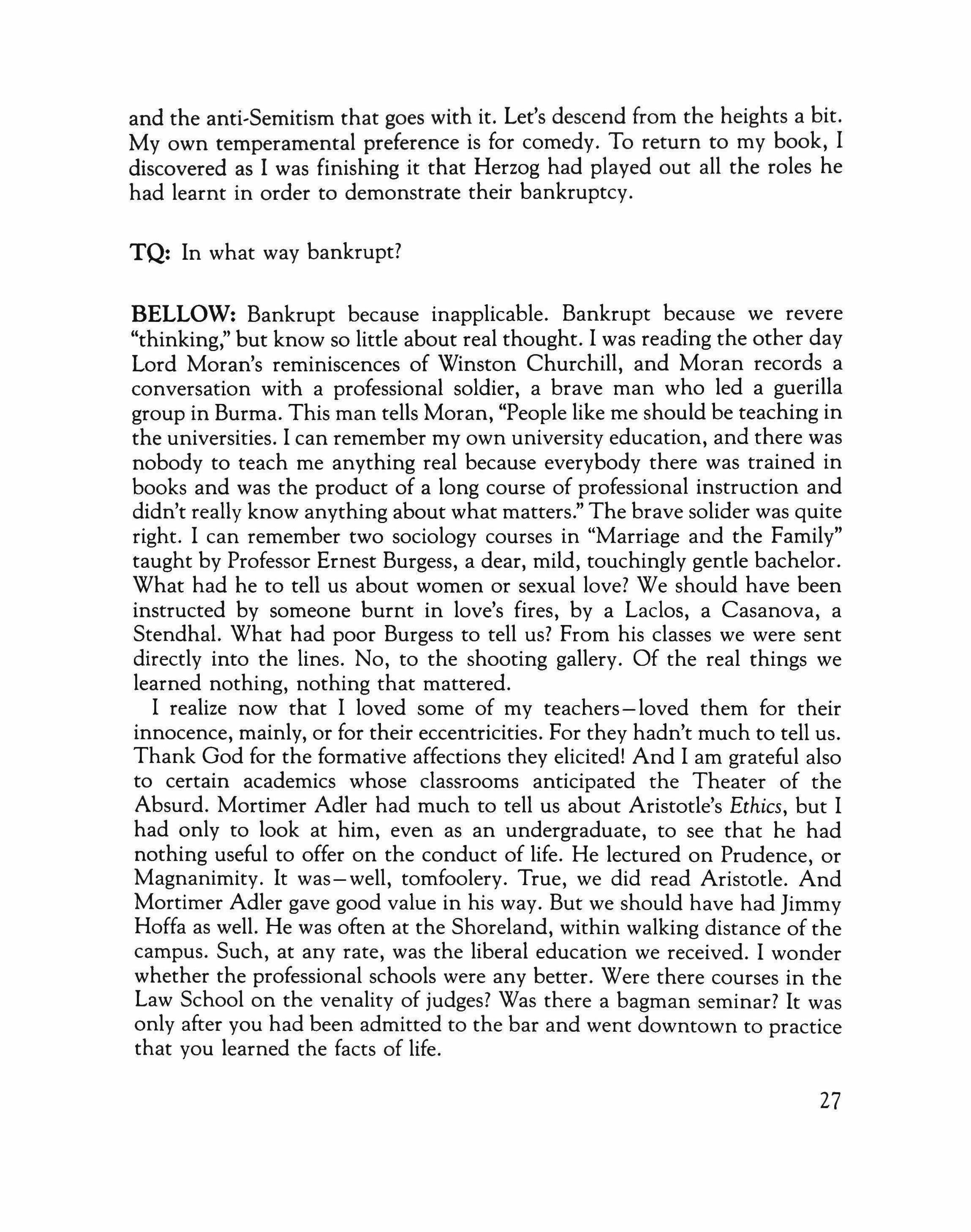
and the anti-Semitism that goes with it. Let's descend from the heights a bit. My own temperamental preference is for comedy. To return to my book, I discovered as I was finishing it that Herzog had played out all the roles he had learnt in order to demonstrate their bankruptcy.
TQ: In what way bankrupt?
BELLOW: Bankrupt because inapplicable. Bankrupt because we revere "thinking," but know so little about real thought. I was reading the other day Lord Moran's reminiscences of Winston Churchill, and Moran records a conversation with a professional soldier, a brave man who led a guerilla group in Burma. This man tells Moran, "People like me should be teaching in the universities. I can remember my own university education, and there was nobody to teach me anything real because everybody there was trained in books and was the product of a long course of professional instruction and didn't really know anything about what matters." The brave solider was quite right. I can remember two sociology courses in "Marriage and the Family" taught by Professor Ernest Burgess, a dear, mild, touchingly gentle bachelor. What had he to tell us about women or sexual love? We should have been instructed by someone burnt in love's fires, by a Laclos, a Casanova, a Stendhal. What had poor Burgess to tell us? From his classes we were sent directly into the lines. No, to the shooting gallery. Of the real things we learned nothing, nothing that mattered.
I realize now that I loved some of my teachers-loved them for their innocence, mainly, or for their eccentricities. For they hadn't much to tell us. Thank God for the formative affections they elicited! And I am grateful also to certain academics whose classrooms anticipated the Theater of the Absurd. Mortimer Adler had much to tell us about Aristotle's Ethics, but I had only to look at him, even as an undergraduate, to see that he had nothing useful to offer on the conduct of life. He lectured on Prudence, or Magnanimity. It was-well, tomfoolery. True, we did read Aristotle. And Mortimer Adler gave good value in his way. But we should have had Jimmy Hoffa as well. He was often at the Shoreland, within walking distance of the campus. Such, at any rate, was the liberal education we received. I wonder whether the professional schools were any better. Were there courses in the Law School on the venality of judges? Was there a bagman seminar? It was only after you had been admitted to the bar and went downtown to practice that you learned the facts of life.
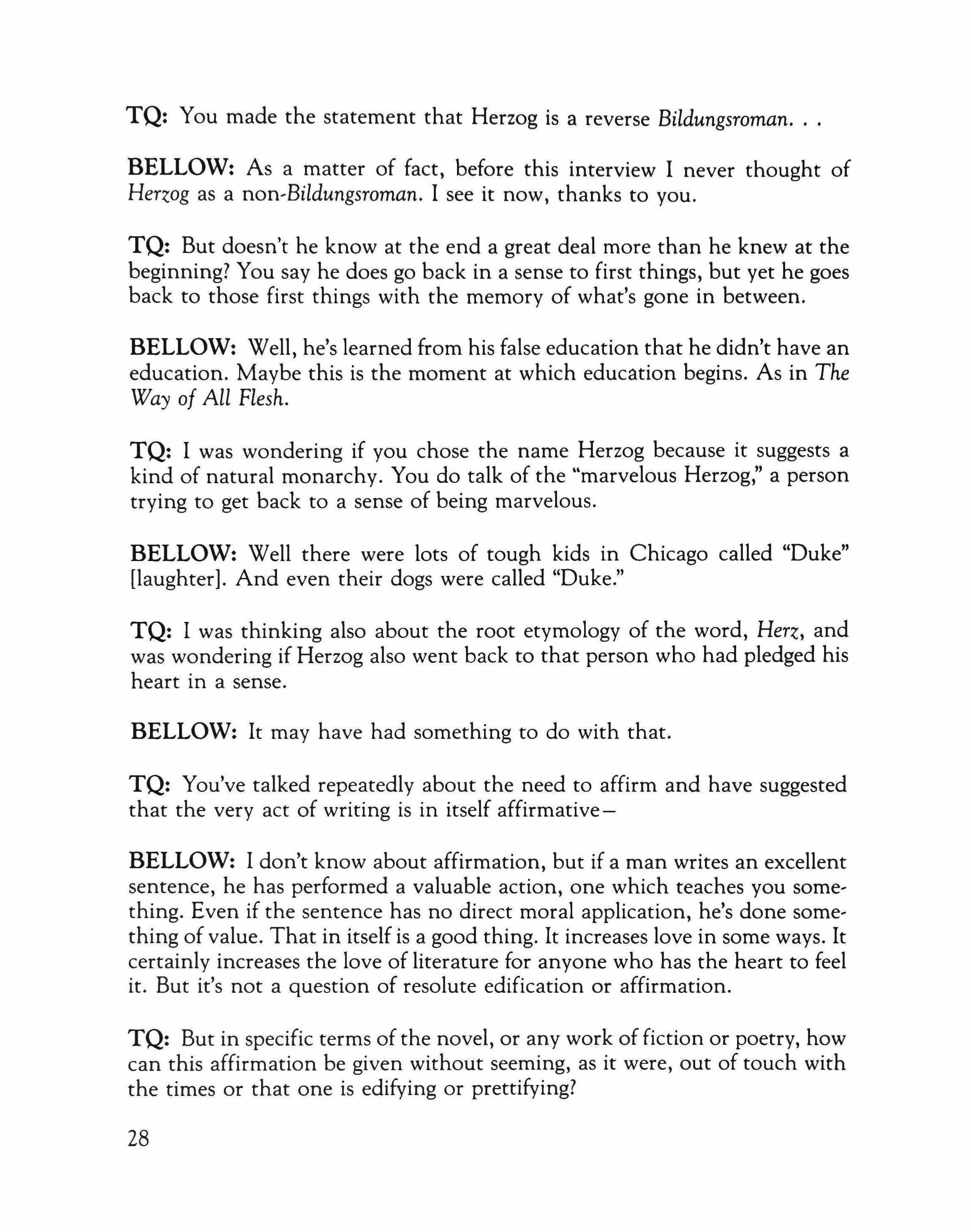
TQ: You made the statement that Herzog is a reverse Bildungsroman
BELLOW: As a matter of fact, before this interview I never thought of Herzog as a non,Bildungsroman. I see it now, thanks to you.
TQ: But doesn't he know at the end a great deal more than he knew at the beginning? You say he does go back in a sense to first things, but yet he goes back to those first things with the memory of what's gone in between.
BELLOW: Well, he's learned from his false education that he didn't have an education. Maybe this is the moment at which education begins. As in The Way of All Flesh.
TQ: I was wondering if you chose the name Herzog because it suggests a kind of natural monarchy. You do talk of the "marvelous Herzog," a person trying to get back to a sense of being marvelous.
BELLOW: Well there were lots of tough kids in Chicago called "Duke" [laughter]. And even their dogs were called "Duke."
TQ: I was thinking also about the root etymology of the word, Herz, and was wondering if Herzog also went back to that person who had pledged his heart in a sense.
BELLOW: It may have had something to do with that.
TQ: You've talked repeatedly about the need to affirm and have suggested that the very act of writing is in itself affirmative-
BELLOW: I don't know about affirmation, but if a man writes an excellent sentence, he has performed a valuable action, one which teaches you some' thing. Even if the sentence has no direct moral application, he's done some, thing of value. That in itself is a good thing. It increases love in some ways. It certainly increases the love of literature for anyone who has the heart to feel it. But it's not a question of resolute edification or affirmation.
TQ: But in specific terms of the novel, or any work of fiction or poetry, how can this affirmation be given without seeming, as it were, out of touch with the times or that one is edifying or prettifying?
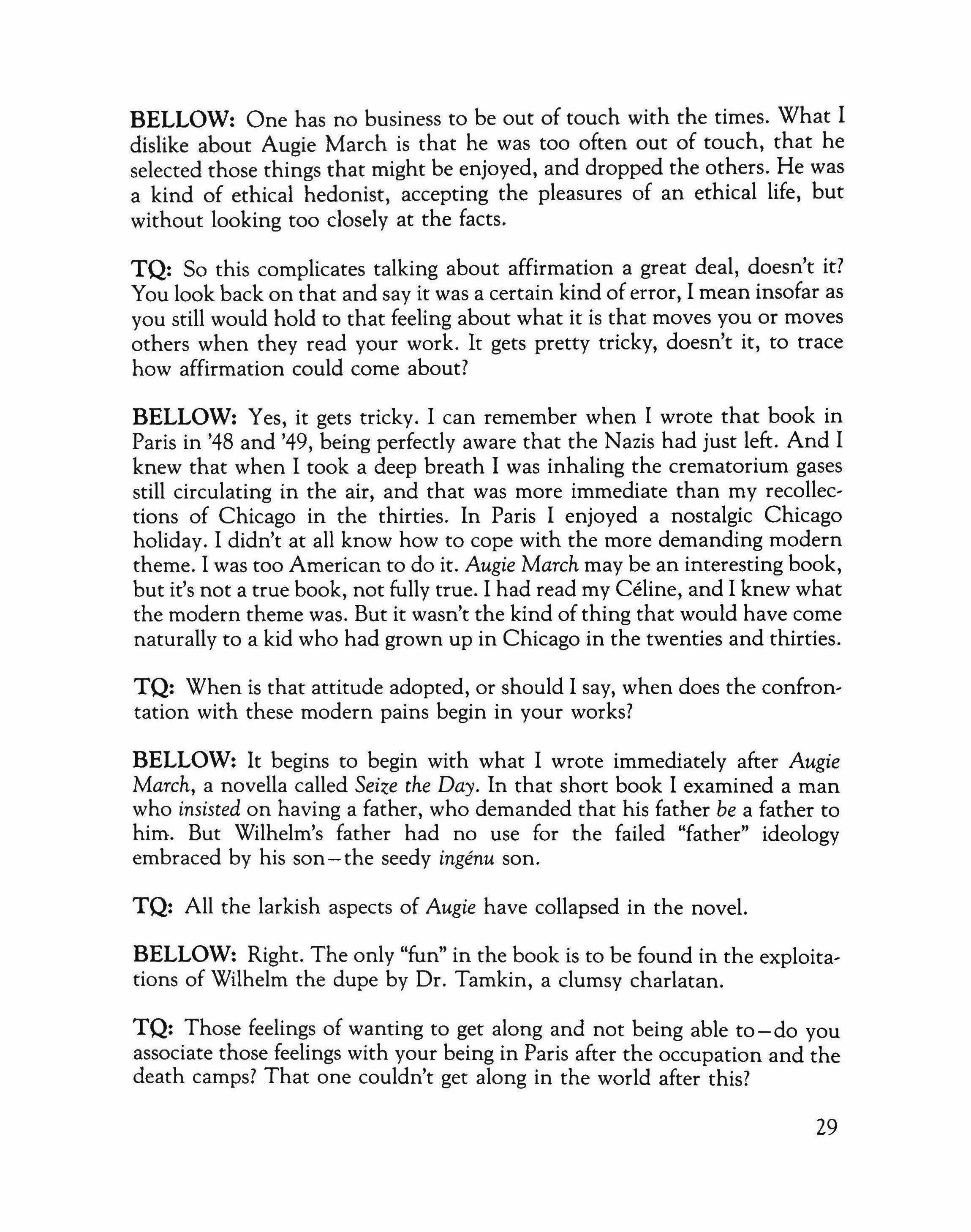
BELLOW: One has no business to be out of touch with the times. What I dislike about Augie March is that he was too often out of touch, that he selected those things that might be enjoyed, and dropped the others. He was a kind of ethical hedonist, accepting the pleasures of an ethical life, but without looking too closely at the facts.
TQ: So this complicates talking about affirmation a great deal, doesn't it? You look back on that and say it was a certain kind of error, I mean insofar as you still would hold to that feeling about what it is that moves you or moves others when they read your work. It gets pretty tricky, doesn't it, to trace how affirmation could come about?
BELLOW: Yes, it gets tricky. I can remember when I wrote that book in Paris in '48 and '49, being perfectly aware that the Nazis had just left. And I knew that when I took a deep breath I was inhaling the crematorium gases still circulating in the air, and that was more immediate than my recollections of Chicago in the thirties. In Paris I enjoyed a nostalgic Chicago holiday. I didn't at all know how to cope with the more demanding modern theme. I was too American to do it. Augie March may be an interesting book, but it's not a true book, not fully true. I had read my Celine, and I knew what the modern theme was. But it wasn't the kind of thing that would have come naturally to a kid who had grown up in Chicago in the twenties and thirties.
TQ: When is that attitude adopted, or should I say, when does the confrontation with these modern pains begin in your works?
BELLOW: It begins to begin with what I wrote immediately after Augie March, a novella called Seize the Day. In that short book I examined a man who insisted on having a father, who demanded that his father be a father to him. But Wilhelm's father had no use for the failed "father" ideology embraced by his son - the seedy ingenu son.
TQ: All the larkish aspects of Augie have collapsed in the novel.
BELLOW: Right. The only "fun" in the book is to be found in the exploitations of Wilhelm the dupe by Dr. Tamkin, a clumsy charlatan.
TQ: Those feelings of wanting to get along and not being able to-do you associate those feelings with your being in Paris after the occupation and the death camps? That one couldn't get along in the world after this?
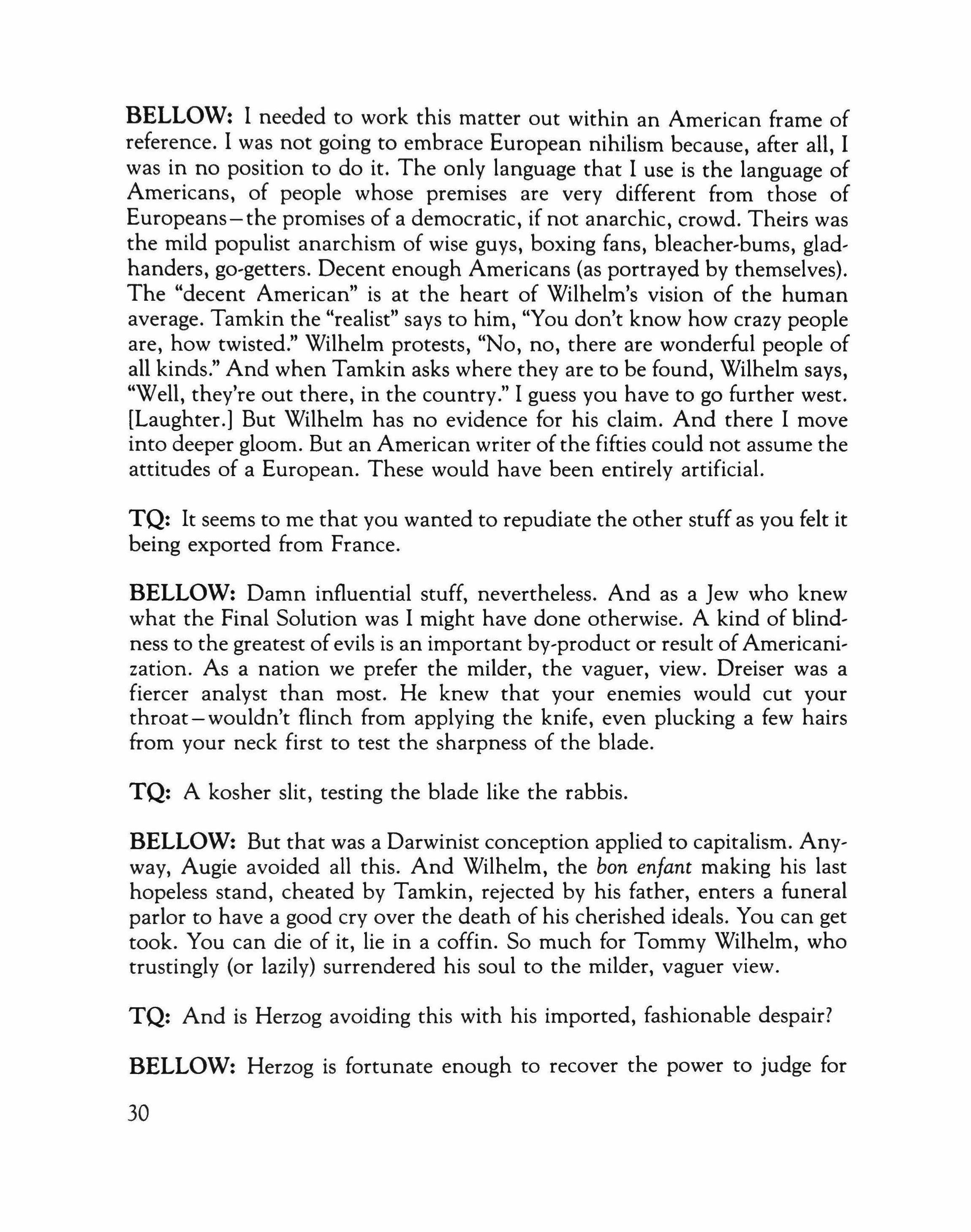
BELLOW: I needed to work this matter out within an American frame of reference. I was not going to embrace European nihilism because, after all, I was in no position to do it. The only language that I use is the language of Americans, of people whose premises are very different from those of Europeans-the promises of a democratic, if not anarchic, crowd. Theirs was the mild populist anarchism of wise guys, boxing fans, bleacher-bums, glad, handers, go-getters. Decent enough Americans (as portrayed by themselves). The "decent American" is at the heart of Wilhelm's vision of the human average. Tamkin the "realist" says to him, "You don't know how crazy people are, how twisted." Wilhelm protests, "No, no, there are wonderful people of all kinds." And when Tamkin asks where they are to be found, Wilhelm says, "Well, they're out there, in the country." I guess you have to go further west. [Laughter.] But Wilhelm has no evidence for his claim. And there I move into deeper gloom. But an American writer ofthe fifties could not assume the attitudes of a European. These would have been entirely artificial.
TQ: It seems to me that you wanted to repudiate the other stuff as you felt it being exported from France.
BELLOW: Damn influential stuff, nevertheless. And as a Jew who knew what the Final Solution was I might have done otherwise. A kind of blind, ness to the greatest ofevils is an important by-product or result ofAmericanization. As a nation we prefer the milder, the vaguer, view. Dreiser was a fiercer analyst than most. He knew that your enemies would cut your throat-wouldn't flinch from applying the knife, even plucking a few hairs from your neck first to test the sharpness of the blade.
TQ: A kosher slit, testing the blade like the rabbis.
BELLOW: But that was a Darwinist conception applied to capitalism. Any, way, Augie avoided all this. And Wilhelm, the bon enfant making his last hopeless stand, cheated by Tamkin, rejected by his father, enters a funeral parlor to have a good cry over the death of his cherished ideals. You can get took. You can die of it, lie in a coffin. So much for Tommy Wilhelm, who trustingly (or lazily) surrendered his soul to the milder, vaguer view.
TQ: And is Herzog avoiding this with his imported, fashionable despair?
BELLOW: Herzog is fortunate enough to recover the power to judge for
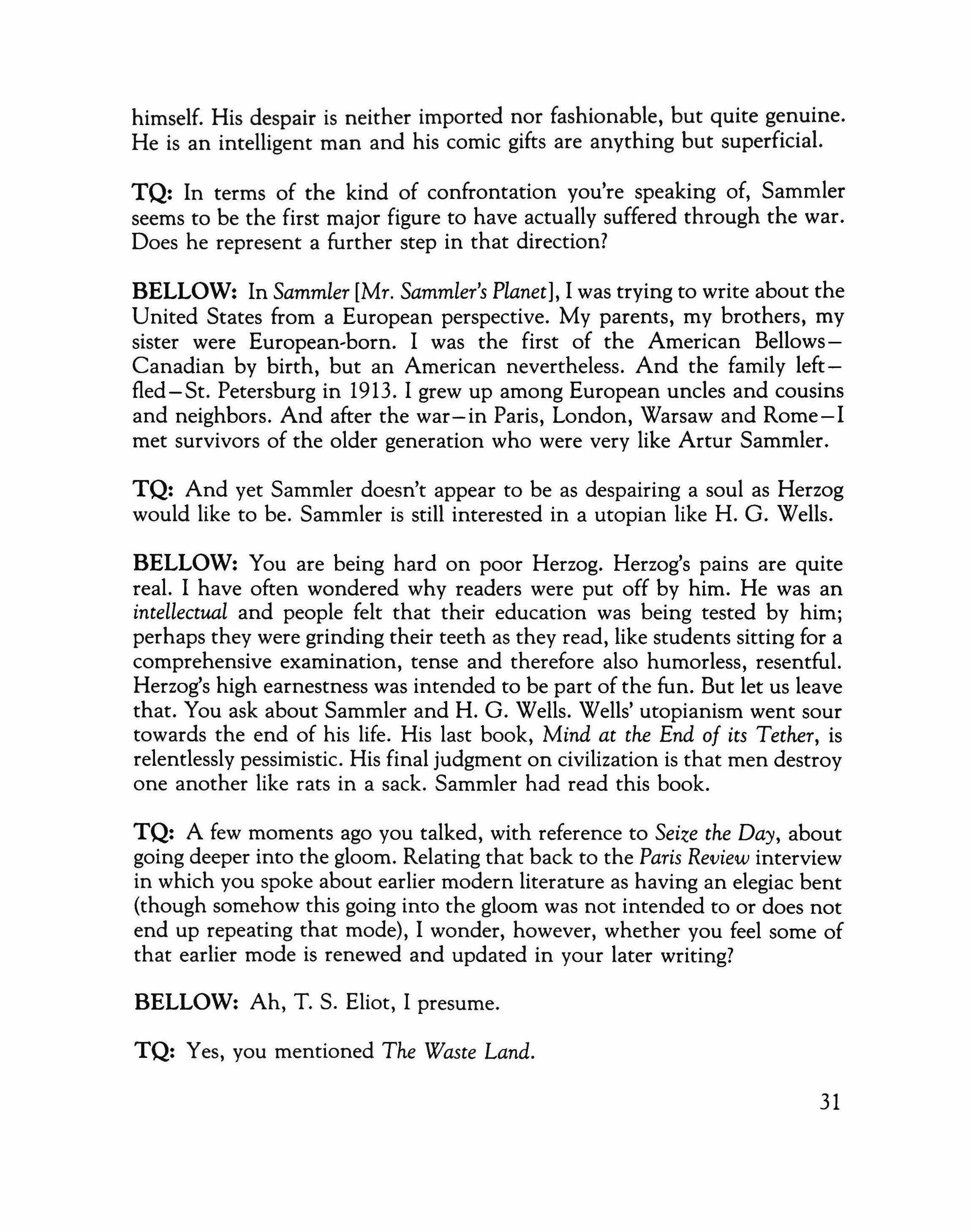
himself. His despair is neither imported nor fashionable, but quite genuine. He is an intelligent man and his comic gifts are anything but superficial.
TQ: In terms of the kind of confrontation you're speaking of, Sammler seems to be the first major figure to have actually suffered through the war. Does he represent a further step in that direction?
BELLOW: In Sammler [Mr. Sammler's Planet], I was trying to write about the United States from a European perspective. My parents, my brothers, my sister were European-born. I was the first of the American BellowsCanadian by birth, but an American nevertheless. And the family leftfled-St. Petersburg in 1913. I grew up among European uncles and cousins and neighbors. And after the war-in Paris, London, Warsaw and Rome-I met survivors of the older generation who were very like Artur Sammler.
TQ: And yet Sammler doesn't appear to be as despairing a soul as Herzog would like to be. Sammler is still interested in a utopian like H. O. Wells.
BELLOW: You are being hard on poor Herzog. Herzog's pains are quite real. I have often wondered why readers were put off by him. He was an intellectual and people felt that their education was being tested by him; perhaps they were grinding their teeth as they read, like students sitting for a comprehensive examination, tense and therefore also humorless, resentful. Herzog's high earnestness was intended to be part of the fun. But let us leave that. You ask about Sammler and H. O. Wells. Wells' utopianism went sour towards the end of his life. His last book, Mind at the End 0/ its Tether, is relentlessly pessimistic. His final judgment on civilization is that men destroy one another like rats in a sack. Sammler had read this book.
TQ: A few moments ago you talked, with reference to Seize the Day, about going deeper into the gloom. Relating that back to the Paris Review interview in which you spoke about earlier modern literature as having an elegiac bent (though somehow this going into the gloom was not intended to or does not end up repeating that mode), I wonder, however, whether you feel some of that earlier mode is renewed and updated in your later writing?
BELLOW: Ah, T. S. Eliot, I presume.
TQ: Yes, you mentioned The Waste Land.
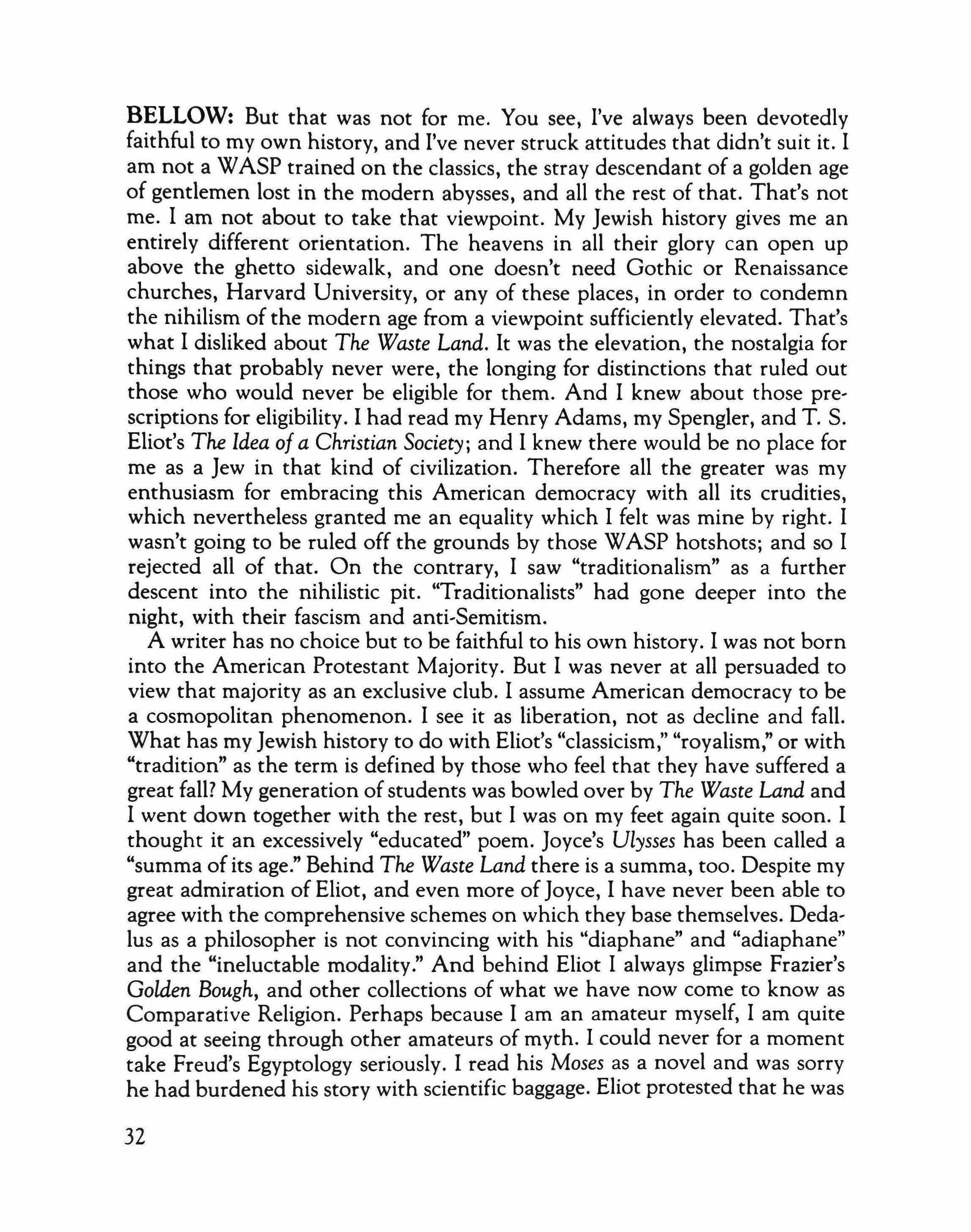
BELLOW: But that was not for me. You see, I've always been devotedly faithful to my own history, and I've never struck attitudes that didn't suit it. I am not a WASP trained on the classics, the stray descendant of a golden age of gentlemen lost in the modern abysses, and all the rest of that. That's not me. I am not about to take that viewpoint. My jewish history gives me an entirely different orientation. The heavens in all their glory can open up above the ghetto sidewalk, and one doesn't need Gothic or Renaissance churches, Harvard University, or any of these places, in order to condemn the nihilism of the modern age from a viewpoint sufficiently elevated. That's what I disliked about The Waste Land. It was the elevation, the nostalgia for things that probably never were, the longing for distinctions that ruled out those who would never be eligible for them. And I knew about those prescriptions for eligibility. I had read my Henry Adams, my Spengler, and T. S. Eliot's The Idea 0/ a Christian Society; and I knew there would be no place for me as a jew in that kind of civilization. Therefore all the greater was my enthusiasm for embracing this American democracy with all its crudities, which nevertheless granted me an equality which I felt was mine by right. I wasn't going to be ruled off the grounds by those WASP hotshots; and so I rejected all of that. On the contrary, I saw "traditionalism" as a further descent into the nihilistic pit. "Traditionalists" had gone deeper into the night, with their fascism and anti-Semitism.
A writer has no choice but to be faithful to his own history. I was not born into the American Protestant Majority. But I was never at all persuaded to view that majority as an exclusive club. I assume American democracy to be a cosmopolitan phenomenon. I see it as liberation, not as decline and fall. What has my jewish history to do with Eliot's "classicism," "royalism," or with "tradition" as the term is defined by those who feel that they have suffered a great fall? My generation ofstudents was bowled over by The Waste Land and I went down together with the rest, but I was on my feet again quite soon. I thought it an excessively "educated" poem. joyce's Ulysses has been called a "summa of its age." Behind The Waste Land there is a summa, too. Despite my great admiration of Eliot, and even more ofjoyce, I have never been able to agree with the comprehensive schemes on which they base themselves. DedaIus as a philosopher is not convincing with his "diaphane" and "adiaphane" and the "ineluctable modality." And behind Eliot I always glimpse Frazier's Golden Bough, and other collections of what we have now come to know as Comparative Religion. Perhaps because I am an amateur myself, I am quite good at seeing through other amateurs of myth. I could never for a moment take Freud's Egyptology seriously. I read his Moses as a novel and was sorry he had burdened his story with scientific baggage. Eliot protested that he was
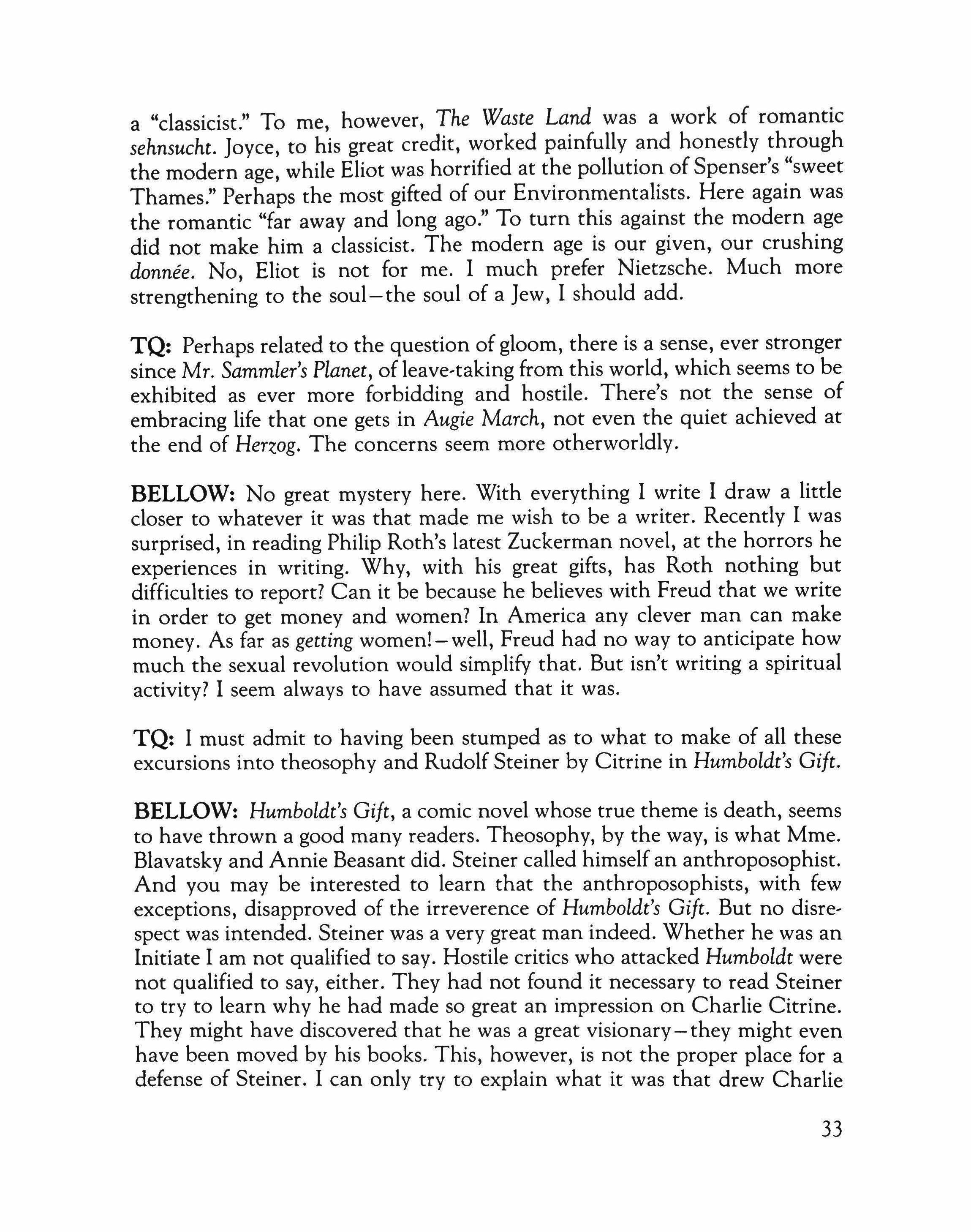
a "classicist." To me, however, The Waste Land was a work of romantic sehnsucht. Joyce, to his great credit, worked painfully and honestly through the modern age, while Eliot was horrified at the pollution of Spenser's "sweet Thames." Perhaps the most gifted of our Environmentalists. Here again was the romantic "far away and long ago." To turn this against the modern age did not make him a classicist. The modern age is our given, our crushing donnee. No, Eliot is not for me. I much prefer Nietzsche. Much more strengthening to the soul-the soul of a Jew, I should add.
TQ: Perhaps related to the question of gloom, there is a sense, ever stronger since Mr. Sammler's Planet, of leave-taking from this world, which seems to be exhibited as ever more forbidding and hostile. There's not the sense of embracing life that one gets in Augie March, not even the quiet achieved at the end of Herzog. The concerns seem more otherworldly.
BELLOW: No great mystery here. With everything I write I draw a little closer to whatever it was that made me wish to be a writer. Recently I was surprised, in reading Philip Roth's latest Zuckerman novel, at the horrors he experiences in writing. Why, with his great gifts, has Roth nothing but difficulties to report? Can it be because he believes with Freud that we write in order to get money and women? In America any clever man can make money. As far as getting women! - well, Freud had no way to anticipate how much the sexual revolution would simplify that. But isn't writing a spiritual activity? I seem always to have assumed that it was.
TQ: I must admit to having been stumped as to what to make of all these excursions into theosophy and Rudolf Steiner by Citrine in Humboldt's Gift.
BELLOW: Humboldt's Gift, a comic novel whose true theme is death, seems to have thrown a good many readers. Theosophy, by the way, is what Mme. Blavatsky and Annie Beasant did. Steiner called himself an anthroposophist. And you may be interested to learn that the anthroposophists, with few exceptions, disapproved of the irreverence of Humboldt's Gift. But no disrespect was intended. Steiner was a very great man indeed. Whether he was an Initiate I am not qualified to say. Hostile critics who attacked Humboldt were not qualified to say, either. They had not found it necessary to read Steiner to try to learn why he had made so great an impression on Charlie Citrine. They might have discovered that he was a great visionary-they might even have been moved by his books. This, however, is not the proper place for a defense of Steiner. I can only try to explain what it was that drew Charlie

Citrine to him. It was, in a word, the recognition that everything which Charlie had taken to be commonsensical, realistic, prudent, normal- his ambitions, marriage, love affairs, possessions, business relations-was a mass of idiocies. "A serious human life? This! You've got to be kidding!" And from demonic absorption in the things of this world, he turns to an invisible world in which he thinks his Being may be founded. Is there, in fact, any basis for religion other than the persistence of the supersensible? "Science" with the aid of modern philosophy - what we call the positive outlook - has driven "the invisible" into the dark night where enlightenment says it belongs. Together with it, in our simplemindedness, we drive away revelation as well, and with revelation we drive out art, also we drive out also dreaming. Dreams are readmitted only through the Ellis Island of science, by officials qualified in the legitimate interpretation of dreams. Music we bootleg. We bring it across the threshold surreptitiously.
The moral law also has a precarious existence among us. Now, what is to prevent a writer from imagining that we exist without revelation, without music and poetry, without the moral law, without the Gods, only in our present depleted and restricted quotidian consciousness, and that in fact life, giving forces sustain us from beyond, and also from within-in sleep, in dream, through imagination, by means of intuition? That the true Unconscious is a much bigger thing than the dark, libidinal province established by Freud, which we enter with the passport of "science." Charlie Citrine does not accept being intimidated by the representatives of"scientific" respectability. I'm a bit that way myself. I can't remember going out of my way to be heterodox. But I was born into an orthodox family, and detested orthodoxy from the first.
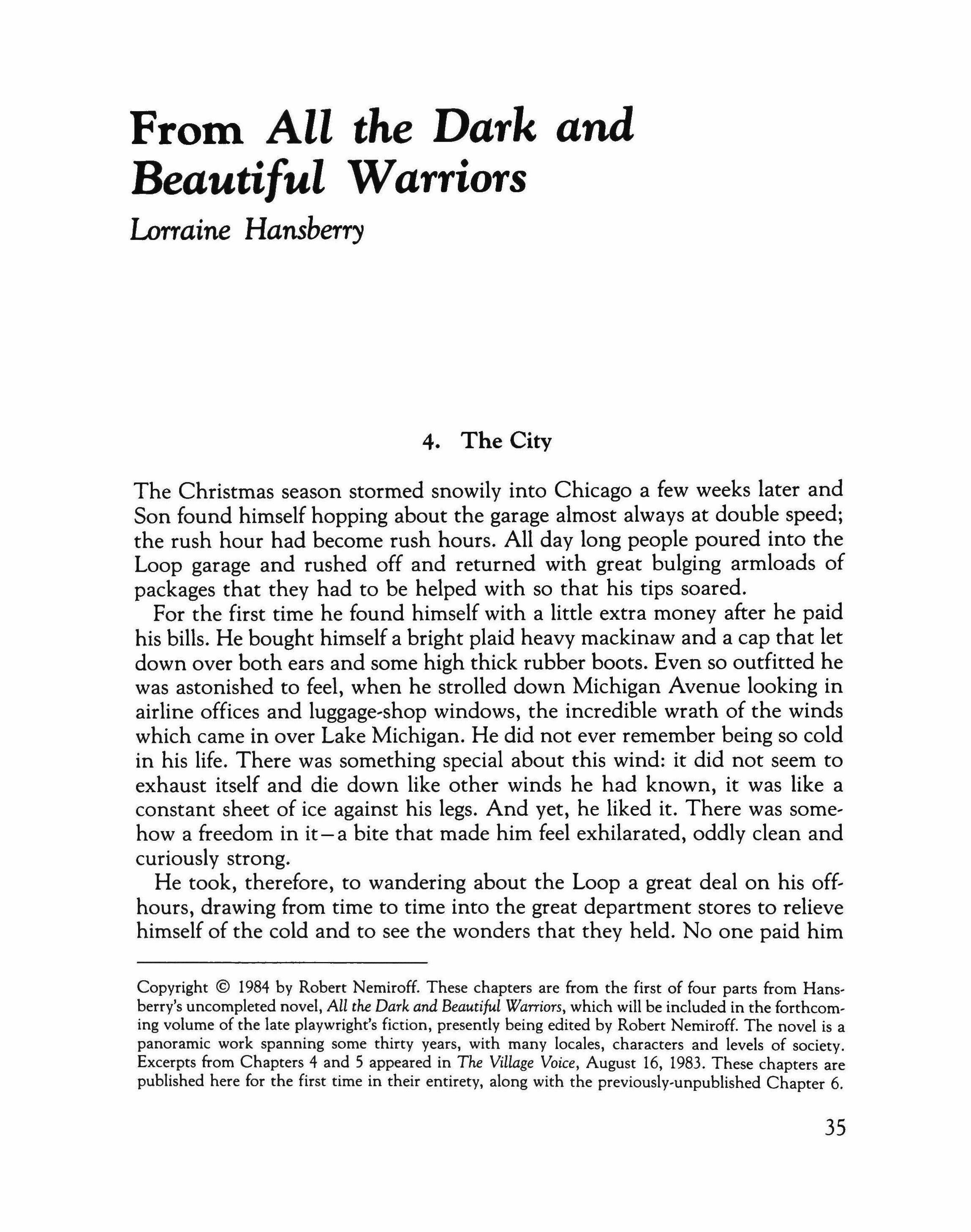
The Christmas season stormed snowily into Chicago a few weeks later and Son found himself hopping about the garage almost always at double speed; the rush hour had become rush hours. All day long people poured into the Loop garage and rushed off and returned with great bulging armloads of packages that they had to be helped with so that his tips soared.
For the first time he found himself with a little extra money after he paid his bills. He bought himself a bright plaid heavy mackinaw and a cap that let down over both ears and some high thick rubber boots. Even so outfitted he was astonished to feel, when he strolled down Michigan Avenue looking in airline offices and luggage-shop windows, the incredible wrath of the winds which came in over Lake Michigan. He did not ever remember being so cold in his life. There was something special about this wind: it did not seem to exhaust itself and die down like other winds he had known, it was like a constant sheet of ice against his legs. And yet, he liked it. There was some, how a freedom in it - a bite that made him feel exhilarated, oddly clean and curiously strong.
He took, therefore, to wandering about the Loop a great deal on his off, hours, drawing from time to time into the great department stores to relieve himself of the cold and to see the wonders that they held. No one paid him
Copyright © 1984 by Robert Nemiroff. These chapters are from the first of four parts from Hansberry's uncompleted novel, All the Dark and Beautiful Warriors, which will be included in the forthcoming volume of the late playwright's fiction, presently being edited by Robert Nemiroff. The novel is a panoramic work spanning some thirty years, with many locales, characters and levels of society. Excerpts from Chapters 4 and 5 appeared in The Village Voice, August 16, 1983. These chapters are published here for the first time in their entirety, along with the previously-unpublished Chapter 6.
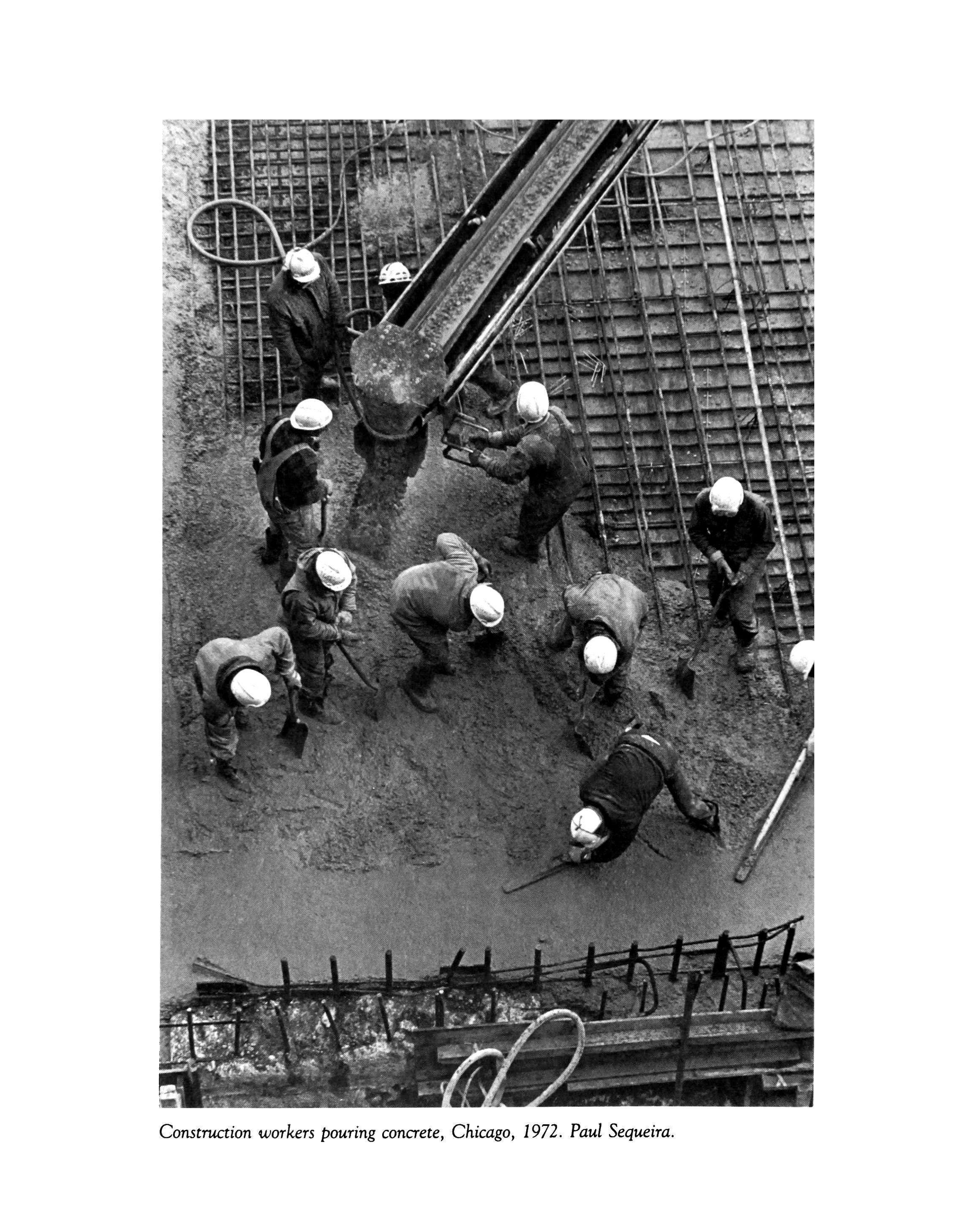 Construction workers pouring concrete, Chicago, 1972. Paul Sequeira.
Construction workers pouring concrete, Chicago, 1972. Paul Sequeira.

much attention, except once when, riding the escalators and eating a hot dog, he wandered into one of the more heavily carpeted salons on the upper floors, where women, with blue-gray hair and dark furs slung back over their chairs, arched their backs and turned amazed eyes on him. He did not return to that floor.
But he enjoyed the city, all of it. Sometimes he crossed the ramparts that led out to a curving drive which edged the great and furious winter lake; he would stand there scanning its immensity, wondering what oceans there might really be in the world more vast. Then he would turn inland suddenly, in a way he had learned to do, and surprise his eyes with the great skyline, cut out and pasted against some mood of the sun; it always gave him a thrill and he went often to the water's edge.
Still, for all of its wonders, faithful to a tradition, the season brought its own sudden, smarting, special loneliness.
When it was worst, the loneliness, he directed his wandering to the South Side. He had never seen that many black people all at one time in his life and the city within a city intrigued him. He took bus rides to its far south corners where the rich Negroes lived, to watch them getting in and out of their cars, to see their houses, their careful lawns, their brushed and shiny children. He learned that they were not friendly as were the people in the neighborhood where his room was; here people hardly broke their step if one engaged them in the streets and seemed suspicious of a stranger's smile.
One Sunday he found a pretty church tucked into a quiet street in Woodlawn; the pastor stood at the door greeting the congregation, a heavy, set man in black robes with red piping on them, who smiled at Son. The boy took off his cap and passed into church with the others. He had liked the sermon very much: it had been a lecture on the meaning of the spirituals and very interesting, the minister being learned and generous in his humor. But people had stared at his mackinaw and his boots and the singing was done mainly by a choir that sang music by men with strange names and even the spirituals in a strange way; he liked better the churches he had found in the bowels of the ghetto, huge and packed and Baptist, where people shouted just as they did down home and patted their feet and clapped their hands when the music got to them. He went to these churches often; sometimes the singing there and the good food at the Wednesday,night suppers that the sisters set out made such an assault on his loneliness that for a few hours he was warm inside and possessed of joy.
Best of all, he found Forty-seventh Street. All manner of life surged there, business people and secretaries and nurses and merchants and housewife
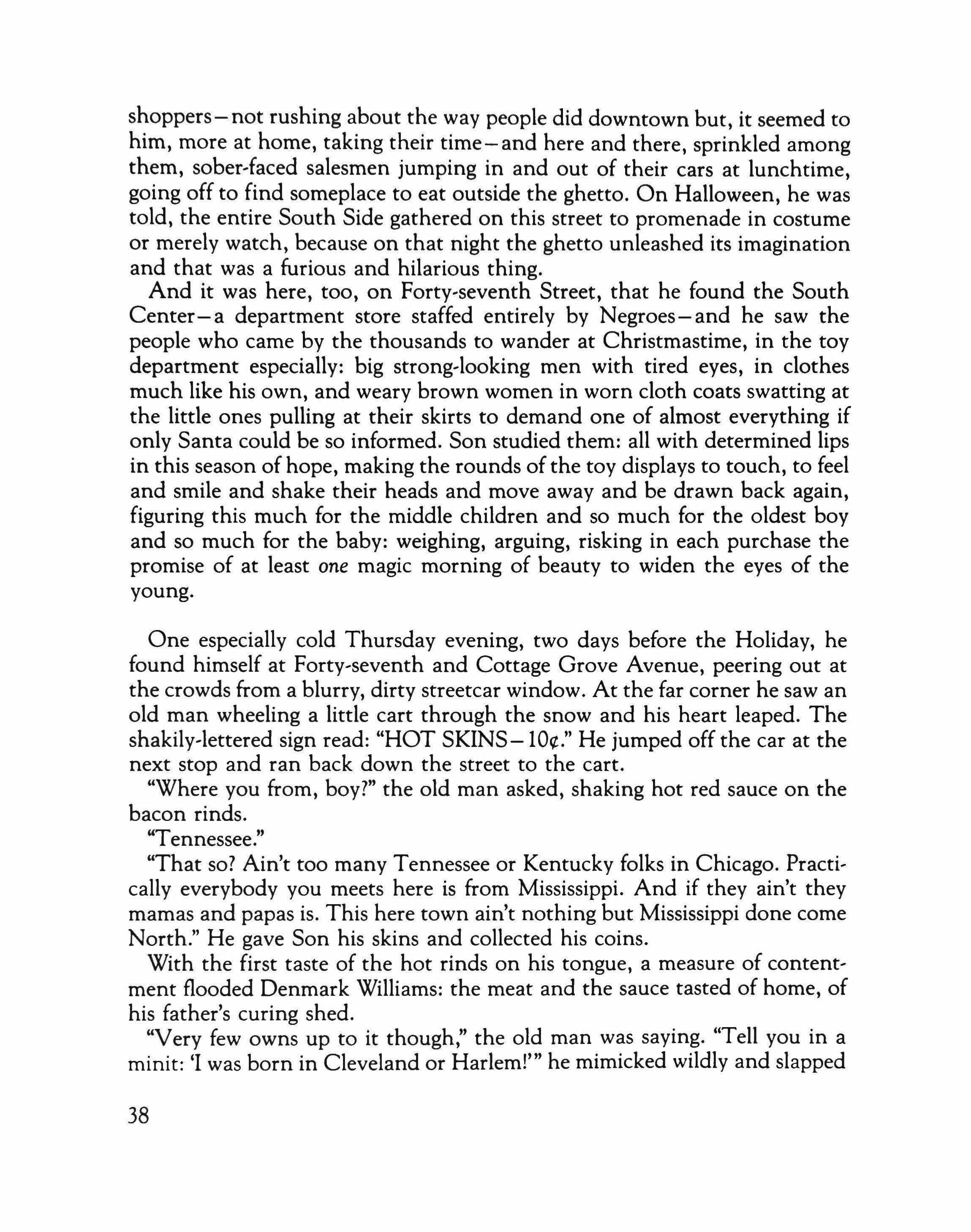
shoppers-not rushing about the way people did downtown but, it seemed to him, more at home, taking their time-and here and there, sprinkled among them, sober-faced salesmen jumping in and out of their cars at lunchtime, going off to find someplace to eat outside the ghetto. On Halloween, he was told, the entire South Side gathered on this street to promenade in costume or merely watch, because on that night the ghetto unleashed its imagination and that was a furious and hilarious thing.
And it was here, too, on Forty-seventh Street, that he found the South Center-a department store staffed entirely by Negroes-and he saw the people who came by the thousands to wander at Christmastime, in the toy department especially: big strong-looking men with tired eyes, in clothes much like his own, and weary brown women in worn cloth coats swatting at the little ones pulling at their skirts to demand one of almost everything if only Santa could be so informed. Son studied them: all with determined lips in this season of hope, making the rounds of the toy displays to touch, to feel and smile and shake their heads and move away and be drawn back again, figuring this much for the middle children and so much for the oldest boy and so much for the baby: weighing, arguing, risking in each purchase the promise of at least one magic morning of beauty to widen the eyes of the young.
One especially cold Thursday evening, two days before the Holiday, he found himself at Forty-seventh and Cottage Grove Avenue, peering out at the crowds from a blurry, dirty streetcar window. At the far corner he saw an old man wheeling a little cart through the snow and his heart leaped. The shakily-lettered sign read: "HOT SKINS-lOet." He jumped off the car at the next stop and ran back down the street to the cart.
"Where you from, boy?" the old man asked, shaking hot red sauce on the bacon rinds.
"Tennessee."
"That so? Ain't too many Tennessee or Kentucky folks in Chicago. Practically everybody you meets here is from Mississippi. And if they ain't they mamas and papas is. This here town ain't nothing but Mississippi done come North." He gave Son his skins and collected his coins.
With the first taste of the hot rinds on his tongue, a measure of contentment flooded Denmark Williams: the meat and the sauce tasted of home, of his father's curing shed.
"Very few owns up to it though," the old man was saying. "Tell you in a minit: 'I was born in Cleveland or Harlernl'" he mimicked wildly and slapped
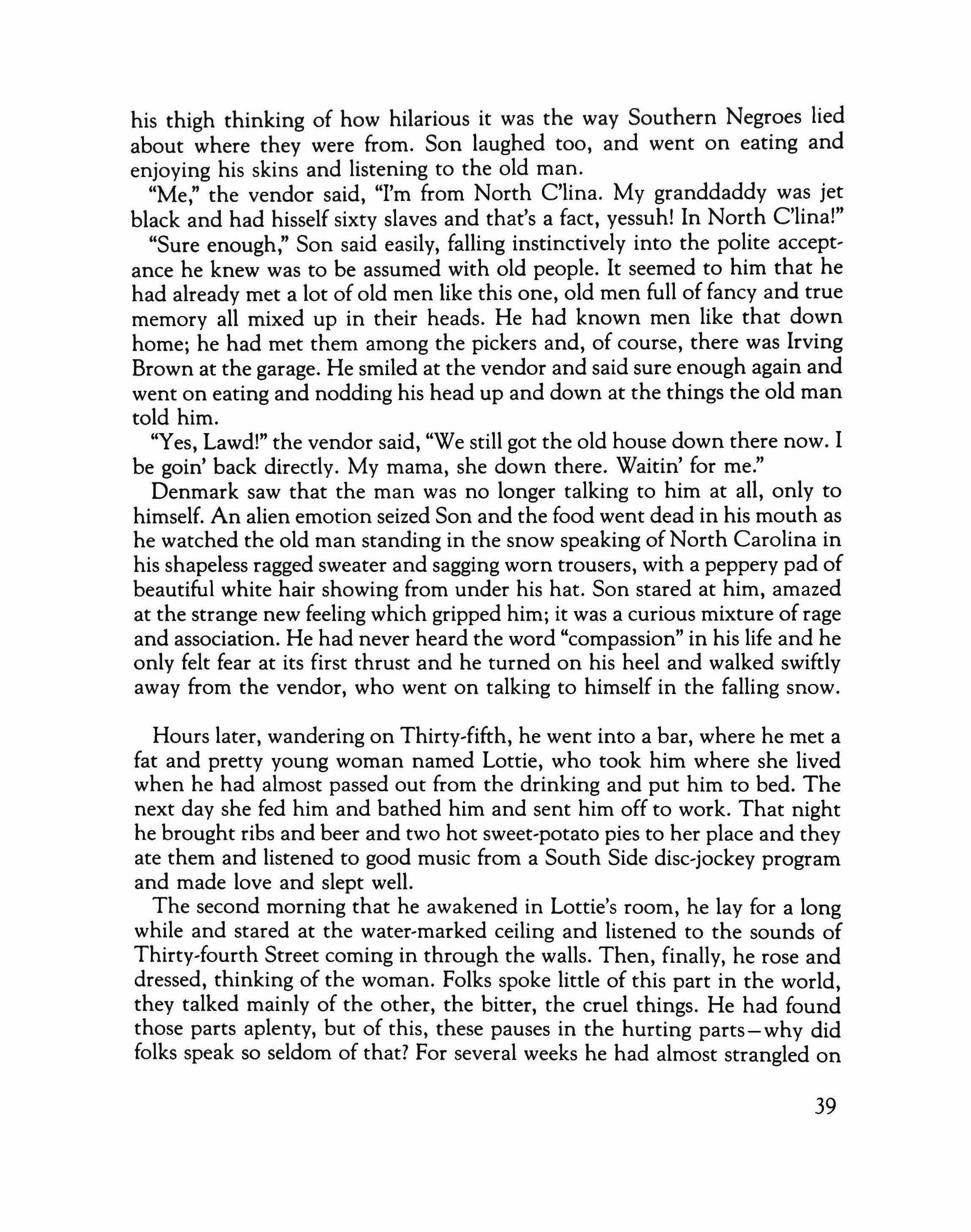
his thigh thinking of how hilarious it was the way Southern Negroes lied about where they were from. Son laughed too, and went on eating and enjoying his skins and listening to the old man.
"Me," the vendor said, "I'm from North C'lina. My granddaddy was jet black and had hisself sixty slaves and that's a fact, yessuh! In North C'lina!"
"Sure enough," Son said easily, falling instinctively into the polite accept' ance he knew was to be assumed with old people. It seemed to him that he had already met a lot of old men like this one, old men full of fancy and true memory all mixed up in their heads. He had known men like that down home; he had met them among the pickers and, of course, there was Irving Brown at the garage. He smiled at the vendor and said sure enough again and went on eating and nodding his head up and down at the things the old man told him.
"Yes, Lawd!" the vendor said, "We still got the old house down there now. I be goin' back directly. My mama, she down there. Waitin' for me."
Denmark saw that the man was no longer talking to him at all, only to himself. An alien emotion seized Son and the food went dead in his mouth as he watched the old man standing in the snow speaking of North Carolina in his shapeless ragged sweater and sagging worn trousers, with a peppery pad of beautiful white hair showing from under his hat. Son stared at him, amazed at the strange new feeling which gripped him; it was a curious mixture of rage and association. He had never heard the word "compassion" in his life and he only felt fear at its first thrust and he turned on his heel and walked swiftly away from the vendor, who went on talking to himself in the falling snow.
Hours later, wandering on Thirty-fifth, he went into a bar, where he met a fat and pretty young woman named Lottie, who took him where she lived when he had almost passed out from the drinking and put him to bed. The next day she fed him and bathed him and sent him off to work. That night he brought ribs and beer and two hot sweet-potato pies to her place and they ate them and listened to good music from a South Side disc-jockey program and made love and slept well.
The second morning that he awakened in Lottie's room, he lay for a long while and stared at the water-marked ceiling and listened to the sounds of Thirty-fourth Street coming in through the walls. Then, finally, he rose and dressed, thinking of the woman. Folks spoke little of this part in the world, they talked mainly of the other, the bitter, the cruel things. He had found those parts aplenty, but of this, these pauses in the hurting parts-why did folks speak so seldom of that? For several weeks he had almost strangled on

his loneliness and then, in a bar, there was Lottie who, for two days, had shared with him. A strangling feeling of affection rose in his throat and he did not look at the woman as he fumbled with his clothes.
She sat by the window with a cup of coffee at her fingers. He had noticed several times how beautiful her hands were: golden brown and fleshy and dimpled but tapered and carefully cleaned and polished with bright happy polish.
"Lottie:' he said finally, "is there some place where you can get a letter?"
The woman hummed to herself and kept on looking out of the window. "Just my mama's house in Gary. That's 'bout all they has to do with me now'days is to send me my mail when they knows where I is. But I don't get too much mail. And I don't hardly stay in one place."
"Then write down the Gary number for me."
The woman did not move. "You don't have to pretend nothing like that, Baby. Once you out that door you be done forgot 'bout Lottie."
"Write it down for me, Lottie."
She looked at him for a second and then got a small nubby pencil from a drawer and wrote something down carefully on a tiny piece of paper. He took it and left and, as far as she could see him, she watched after him from her window.
That Christmas, Hiram Braithwaite once again went out and bought the largest Christmas tree he could find for his family and brought it back and his wife shook her head and said that there was something about that man that he just had to have the biggest Christmas tree in the world. And Candace, sitting on the floor, wrapping gifts for the sixteenth Christmas of her life, looked up at it and wondered if there was anything she could say, anything she could do, anything she could wear to school which would make Cliff MacKay want to ask her to go with him to the Delta Sigma Christmas Dance. She was quite certain there was not.
She came in and took off her coat and gloves and left them in the foyer. In the living room the gas logs were going and everything would look and feel very dry and warm and British. And that was as it should be because she was feeling, because of the blustery gray day and the feel of her woolen skirt and
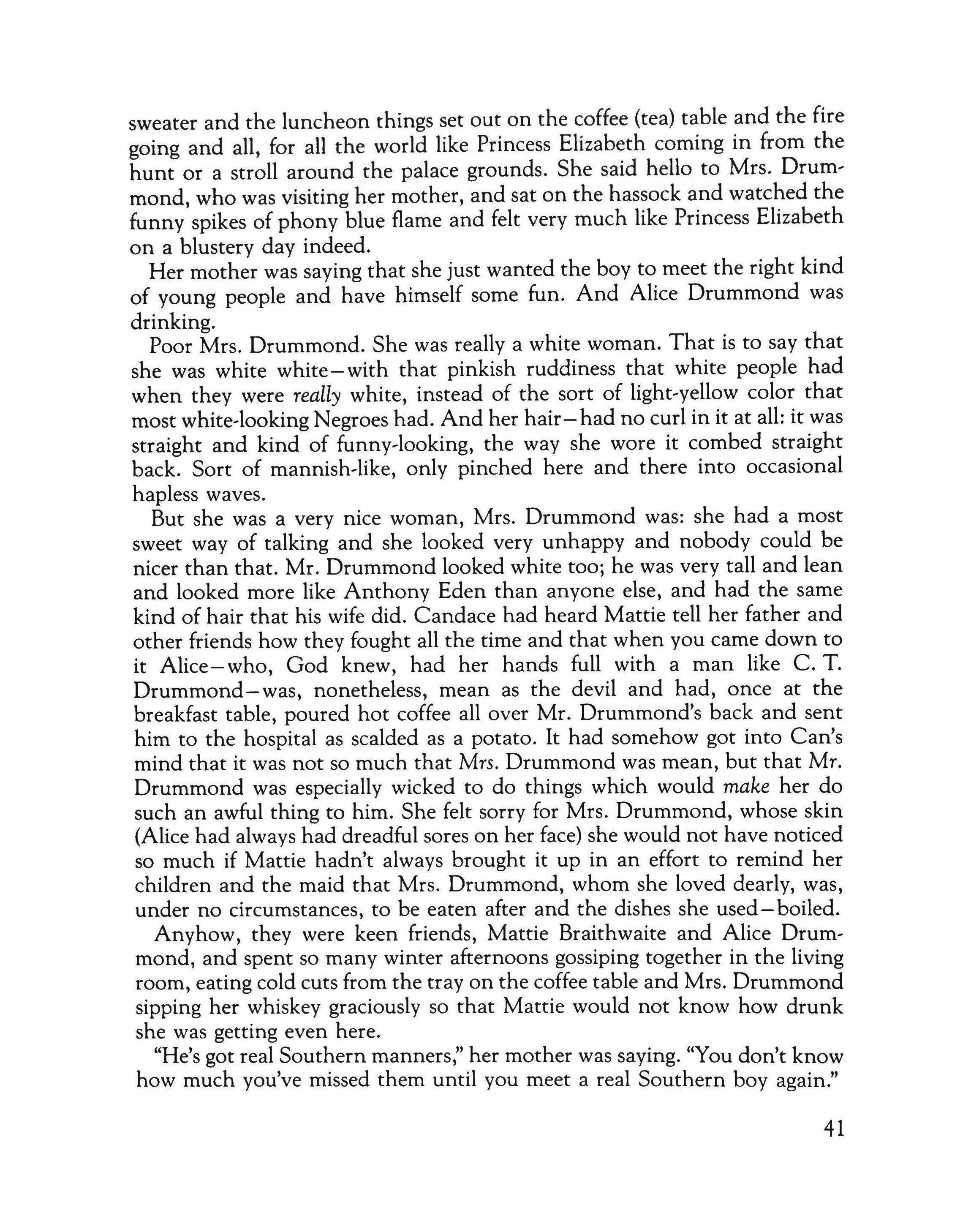
sweater and the luncheon things set out on the coffee (tea) table and the fire going and all, for all the world like Princess Elizabeth coming in from the hunt or a stroll around the palace grounds. She said hello to Mrs. Drum, mond, who was visiting her mother, and sat on the hassock and watched the funny spikes of phony blue flame and felt very much like Princess Elizabeth on a blustery day indeed.
Her mother was saying that she just wanted the boy to meet the right kind of young people and have himself some fun. And Alice Drummond was drinking.
Poor Mrs. Drummond. She was really a white woman. That is to say that she was white white-with that pinkish ruddiness that white people had when they were really white, instead of the sort of light-vellow color that most white-looking Negroes had. And her hair-had no curl in it at all: it was straight and kind of funny-looking, the way she wore it combed straight back. Sort of mannish-like, only pinched here and there into occasional hapless waves.
But she was a very nice woman, Mrs. Drummond was: she had a most sweet way of talking and she looked very unhappy and nobody could be nicer than that. Mr. Drummond looked white too; he was very tall and lean and looked more like Anthony Eden than anyone else, and had the same kind of hair that his wife did. Candace had heard Mattie tell her father and other friends how they fought all the time and that when you came down to it Alice-who, God knew, had her hands full with a man like C. T. Drummondwas, nonetheless, mean as the devil and had, once at the breakfast table, poured hot coffee all over Mr. Drummond's back and sent him to the hospital as scalded as a potato. It had somehow got into Can's mind that it was not so much that Mrs. Drummond was mean, but that Mr. Drummond was especially wicked to do things which would make her do such an awful thing to him. She felt sorry for Mrs. Drummond, whose skin (Alice had always had dreadful sores on her face) she would not have noticed so much if Mattie hadn't always brought it up in an effort to remind her children and the maid that Mrs. Drummond, whom she loved dearly, was, under no circumstances, to be eaten after and the dishes she used - boiled.
Anyhow, they were keen friends, Mattie Braithwaite and Alice Drum, mond, and spent so many winter afternoons gossiping together in the living room, eating cold cuts from the tray on the coffee table and Mrs. Drummond sipping her whiskey graciously so that Mattie would not know how drunk she was getting even here.
"He's got real Southern manners," her mother was saying. "You don't know how much you've missed them until you meet a real Southern boy again."
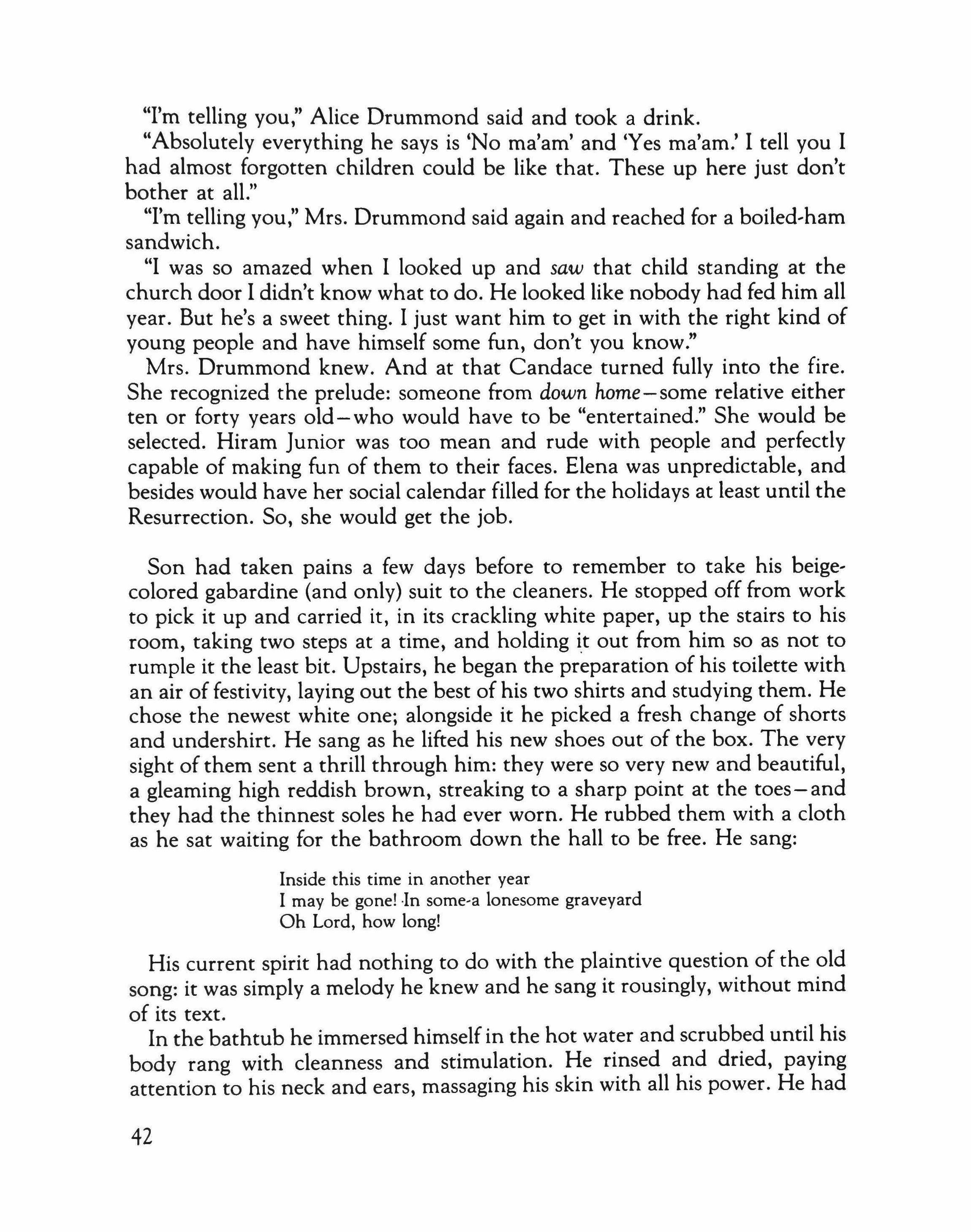
"I'm telling you," Alice Drummond said and took a drink.
"Absolutely everything he says is 'No ma'am' and 'Yes ma'am.' I tell you I had almost forgotten children could be like that. These up here just don't bother at all."
"I'm telling you," Mrs. Drummond said again and reached for a boiled-ham sandwich.
"I was so amazed when I looked up and saw that child standing at the church door I didn't know what to do. He looked like nobody had fed him all year. But he's a sweet thing. I just want him to get in with the right kind of young people and have himself some fun, don't you know."
Mrs. Drummond knew. And at that Candace turned fully into the fire. She recognized the prelude: someone from down home-some relative either ten or forty years old - who would have to be "entertained." She would be selected. Hiram Junior was too mean and rude with people and perfectly capable of making fun of them to their faces. Elena was unpredictable, and besides would have her social calendar filled for the holidays at least until the Resurrection. So, she would get the job.
Son had taken pains a few days before to remember to take his beige' colored gabardine (and only) suit to the cleaners. He stopped off from work to pick it up and carried it, in its crackling white paper, up the stairs to his room, taking two steps at a time, and holding it out from him so as not to rumple it the least bit. Upstairs, he began the preparation of his toilette with an air of festivity, laying out the best of his two shirts and studying them. He chose the newest white one; alongside it he picked a fresh change of shorts and undershirt. He sang as he lifted his new shoes out of the box. The very sight of them sent a thrill through him: they were so very new and beautiful, a gleaming high reddish brown, streaking to a sharp point at the toes - and they had the thinnest soles he had ever worn. He rubbed them with a cloth as he sat waiting for the bathroom down the hall to be free. He sang:
Inside this time in another year
I may be gone! -ln some-a lonesome graveyard
Oh Lord, how long!
His current spirit had nothing to do with the plaintive question of the old song: it was simply a melody he knew and he sang it rousingly, without mind of its text.
In the bathtub he immersed himself in the hot water and scrubbed until his body rang with cleanness and stimulation. He rinsed and dried, paying attention to his neck and ears, massaging his skin with all his power. He had
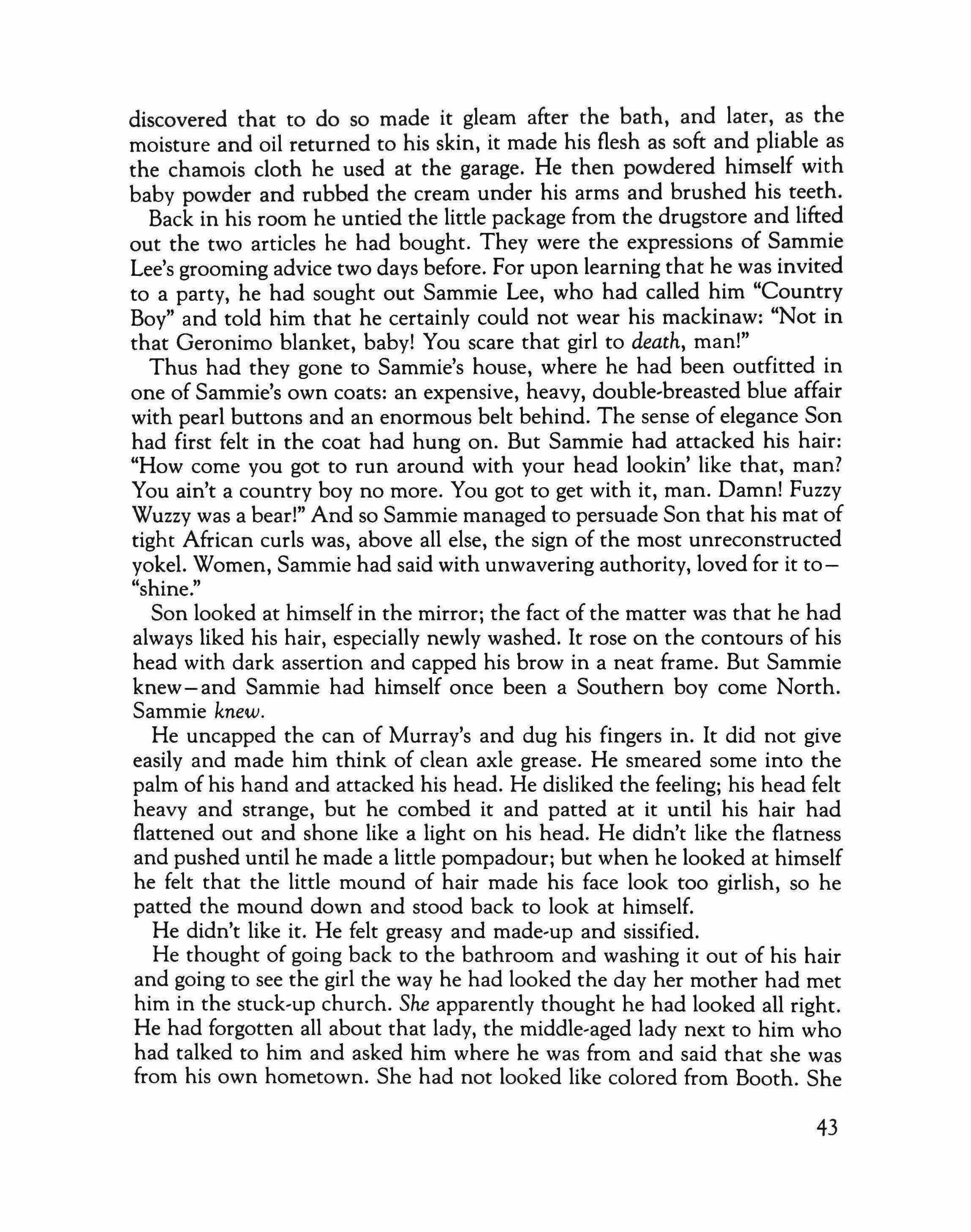
discovered that to do so made it gleam after the bath, and later, as the moisture and oil returned to his skin, it made his flesh as soft and pliable as the chamois cloth he used at the garage. He then powdered himself with baby powder and rubbed the cream under his arms and brushed his teeth. Back in his room he untied the little package from the drugstore and lifted out the two articles he had bought. They were the expressions of Sammie Lee's grooming advice two days before. For upon learning that he was invited to a party, he had sought out Sammie Lee, who had called him "Country Boy" and told him that he certainly could not wear his mackinaw: "Not in that Geronimo blanket, baby! You scare that girl to death, man!"
Thus had they gone to Sammie's house, where he had been outfitted in one of Sammie's own coats: an expensive, heavy, double-breasted blue affair with pearl buttons and an enormous belt behind. The sense of elegance Son had first felt in the coat had hung on. But Sammie had attacked his hair: "How come you got to run around with your head lookin' like that, man? You ain't a country boy no more. You got to get with it, man. Damn! Fuzzy Wuzzy was a bear!" And so Sammie managed to persuade Son that his mat of tight African curls was, above all else, the sign of the most unreconstructed yokel. Women, Sammie had said with unwavering authority, loved for it to"shine."
Son looked at himself in the mirror; the fact of the matter was that he had always liked his hair, especially newly washed. It rose on the contours of his head with dark assertion and capped his brow in a neat frame. But Sammie knew-and Sammie had himself once been a Southern boy come North. Sammie knew.
He uncapped the can of Murray's and dug his fingers in. It did not give easily and made him think of clean axle grease. He smeared some into the palm of his hand and attacked his head. He disliked the feeling; his head felt heavy and strange, but he combed it and patted at it until his hair had flattened out and shone like a light on his head. He didn't like the flatness and pushed until he made a little pompadour; but when he looked at himself he felt that the little mound of hair made his face look too girlish, so he patted the mound down and stood back to look at himself.
He didn't like it. He felt greasy and made-up and sissified.
He thought of going back to the bathroom and washing it out of his hair and going to see the girl the way he had looked the day her mother had met him in the stuck-up church. She apparently thought he had looked all right. He had forgotten all about that lady, the middle,aged lady next to him who had talked to him and asked him where he was from and said that she was from his own hometown. She had not looked like colored from Booth. She

had looked rich and stuck-up like the rest of the folks in that church; in fact, she had left the church in a car driven by a liveried chauffeur, and he hadn't ever seen colored doing things like that before in his life. But when she asked what his name was and he told her, she had sounded just like Booth colored, "Lord, honey, you Buck Williams' boy!" - and she had cried, standing there in the big thick fur coat such as the women wore in the Loop. She had asked him for the number where he lived and he had given it-and she had called to say that her daughter would like him to escort her to a club party. She had called.
He looked at himself again, turning his head slowly from side to side and watching himself from the corner of his eyes. Well. He left his hair alone and put on his underwear; when that was done he spilled out some of the liquid from the second bottle he had bought. It was a man's cologne called "Tigeraire" - and Sammie Lee had said that it was the best. Son rubbed it into his skin and sang.
Candace sat up on the bed and slipped her new sheer nylons over the too' skinny legs which Elena called "African."
Her fretting had passed as the day approached and Cliff MacKay had indeed not called. Nor had anyone-except Wilhemenia "just to check" she was "still coming anyway, Sugar." Perhaps it was just as well she would not have to go alone. Or with that awful Terry James, who was all hands. She shuddered at the memory of last Christmas. Well. Mattie's discovery would be ringing the bell any minute now. A twinge of apprehension seized her, but she waved it away. Everything in life could not be all bad. And at least, Mattie had said, he did have manners.
She sat down before her mirror at the vanity. Why couldn't I have been born ugly? she thought suddenly. Stark, raving ugly. Then I would have read books all the time and been very eccentric and very brilliant. She looked at herself. But I am not ugly and I shan't ever be ugly, not really ugly.
She stared at her face. I shall never be beautiful either. She pinched the cheeks which, like her body, were still chubby with adolescence. All except for the legs. She thought: nothing is exaggerated enough about me. I shall never be striking. No sudden dimples when I smile. Daddy was wrong. No dark haunting eyes. No chiseled African features or gleaming jet-black skinnothing. Just plain brown ordinariness.
She frowned. I could really have been a great actress, I think. Negro actresses don't get to do much, though. But I would have been a great one anyhow. If only I had been beautiful-really beautiful. My hair is all right. I

like my hair. She put her brush to the thick, black heavy mass that hung to her shoulders. I have lovely hair. A man will love this hair someday.
She smiled at last and rose and went downstairs to meet the date that Fate, with a nudge from Mattie, had sent her.
At the party she chose a pair of seats, when they got their plates filled at the buffet table, beside a far corner wall. In the darkest corner.
"We didn't get no punch," he said.
She didn't turn her head to look at him. She would not look at him again, she had decided. No matter what. Her wildest preparatory fears had not prepared her: a Fortv-seventh Street-looking summer-weight gabardine suit and red, pointed shoes! She couldn't believe it when she had seen him corne up the walk to her house. Her mother, she resolved, near tears again, was an astonishing person. Numbly had she got him into the car, numbly had she directed him into the horne of Wilhemenia Redgate. There was no arguing with Mattie in some matters; she had little fits of democracy about anybody who appeared from Booth; she cried and got folksier than ever. Candace determined that they would sit as long as possible in the corner and then leave.
"I don't care for any, thank you;' she said without turning her head to him.
"You feelin' bad?"
His voice was soft; it bore within immediate whispers of something so acutely familiar and gentle and despised that she was quite certain that if he spoke again, said anything at all-she would faint. Moreover, she could smell him. He was wearing something of infinite sensuality and heaviness. It was not, curiously enough, she thought, cheap; but it appeared that he had worn all that had been in the bottle and it, in turn, had mingled with the scent of shaving lotion and that pomade. She longed to feel positively ill, but it did not come.
"I'm all right," she replied, lifting food to her mouth stiffly and looking straight ahead. Cliff MacKay and Janice Ardrey were dancing not far from them and looking in their direction every other beat. She had brought them a sensation all right! Surely God did not put people on earth to subject them to such as this, she thought: she would be the talk of the Laurus for generations. It was then that she became aware that she could also hear him. Eating. She turned and let her eyes course over him icily, from his plate, where his fingers were disengaging a piece ofbread from the cole slaw, and on up slowly to his eyes. He stared back at her and then, suddenly, she was terrified: she could see that he understood and was angry.
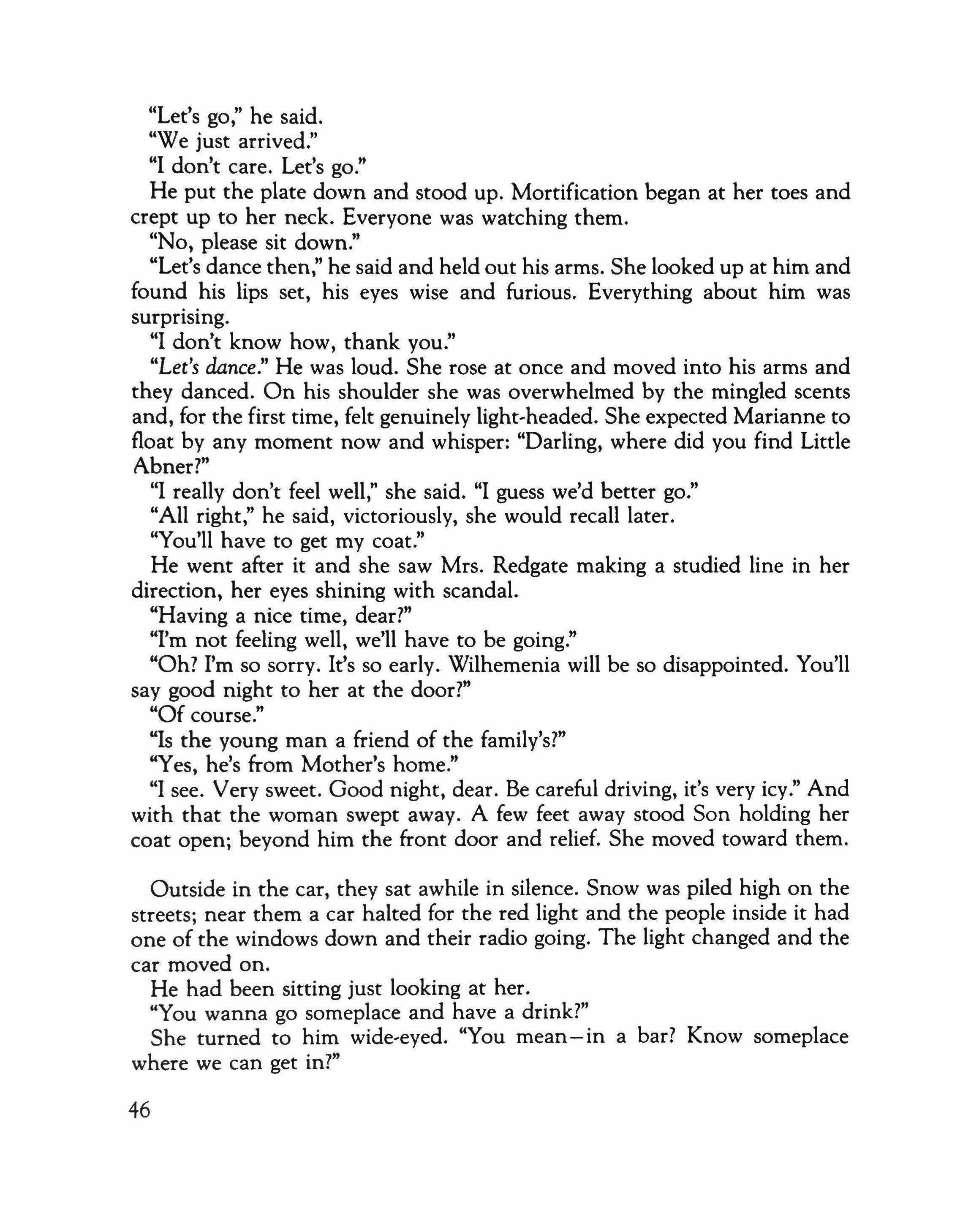
"Let's go," he said.
"We just arrived."
"I don't care. Let's go."
He put the plate down and stood up. Mortification began at her toes and crept up to her neck. Everyone was watching them.
"No, please sit down."
"Let's dance then," he said and held out his arms. She looked up at him and found his lips set, his eyes wise and furious. Everything about him was surprising.
"I don't know how, thank you."
"Let's dance." He was loud. She rose at once and moved into his arms and they danced. On his shoulder she was overwhelmed by the mingled scents and, for the first time, felt genuinely light-headed. She expected Marianne to float by any moment now and whisper: "Darling, where did you find Little Abner?"
"I really don't feel well," she said. "I guess we'd better go."
"All right," he said, victoriously, she would recall later.
"You'll have to get my coat."
He went after it and she saw Mrs. Redgate making a studied line in her direction, her eyes shining with scandal.
"Having a nice time, dear?"
"I'm not feeling well, we'll have to be going."
"Oh? I'm so sorry. It's so early. Wilhemenia will be so disappointed. You'll say good night to her at the door?"
"Of course."
"Is the young man a friend of the family's?"
"Yes, he's from Mother's home."
"I see. Very sweet. Good night, dear. Be careful driving, it's very icy." And with that the woman swept away. A few feet away stood Son holding her coat open; beyond him the front door and relief. She moved toward them.
Outside in the car, they sat awhile in silence. Snow was piled high on the streets; near them a car halted for the red light and the people inside it had one of the windows down and their radio going. The light changed and the car moved on.
He had been sitting just looking at her.
"You wanna go someplace and have a drink?"
She turned to him wide-eyed. "You mean-in a bar? Know someplace where we can get in?"
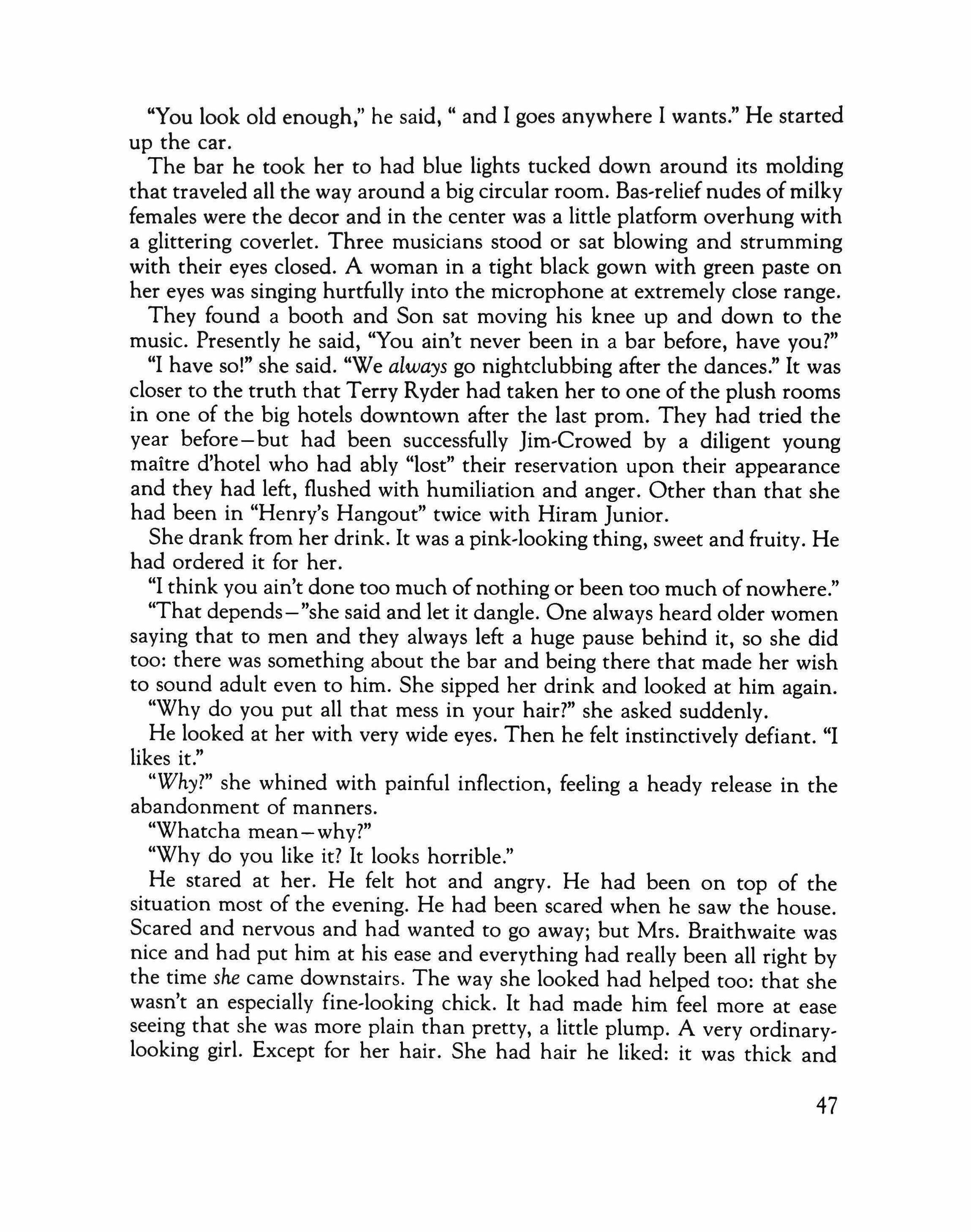
"You look old enough," he said, and I goes anywhere I wants." He started up the car.
The bar he took her to had blue lights tucked down around its molding that traveled all the way around a big circular room. Bas-relief nudes of milky females were the decor and in the center was a little platform overhung with a glittering coverlet. Three musicians stood or sat blowing and strumming with their eyes closed. A woman in a tight black gown with green paste on her eyes was singing hurtfully into the microphone at extremely close range.
They found a booth and Son sat moving his knee up and down to the music. Presently he said, "You ain't never been in a bar before, have you?"
"I have so!" she said. "We always go nightclubbing after the dances." It was closer to the truth that Terry Ryder had taken her to one of the plush rooms in one of the big hotels downtown after the last prom. They had tried the year before-but had been successfully jim-Crowed by a diligent young maitre d'hotel who had ably "lost" their reservation upon their appearance and they had left, flushed with humiliation and anger. Other than that she had been in "Henry's Hangout" twice with Hiram Junior.
She drank from her drink. It was a pink-lookingthing, sweet and fruity. He had ordered it for her.
"I think you ain't done too much ofnothing or been too much of nowhere."
"That depends-"she said and let it dangle. One always heard older women saying that to men and they always left a huge pause behind it, so she did too: there was something about the bar and being there that made her wish to sound adult even to him. She sipped her drink and looked at him again.
"Why do you put all that mess in your hair?" she asked suddenly. He looked at her with very wide eyes. Then he felt instinctively defiant. "I likes it."
"Why?" she whined with painful inflection, feeling a heady release in the abandonment of manners.
"Whatcha mean-why?"
"Why do you like it? It looks horrible."
He stared at her. He felt hot and angry. He had been on top of the situation most of the evening. He had been scared when he saw the house. Scared and nervous and had wanted to go away; but Mrs. Braithwaite was nice and had put him at his ease and everything had really been all right by the time she came downstairs. The way she looked had helped too: that she wasn't an especially fine-looking chick. It had made him feel more at ease seeing that she was more plain than pretty, a little plump. A very ordinarylooking girl. Except for her hair. She had hair he liked: it was thick and
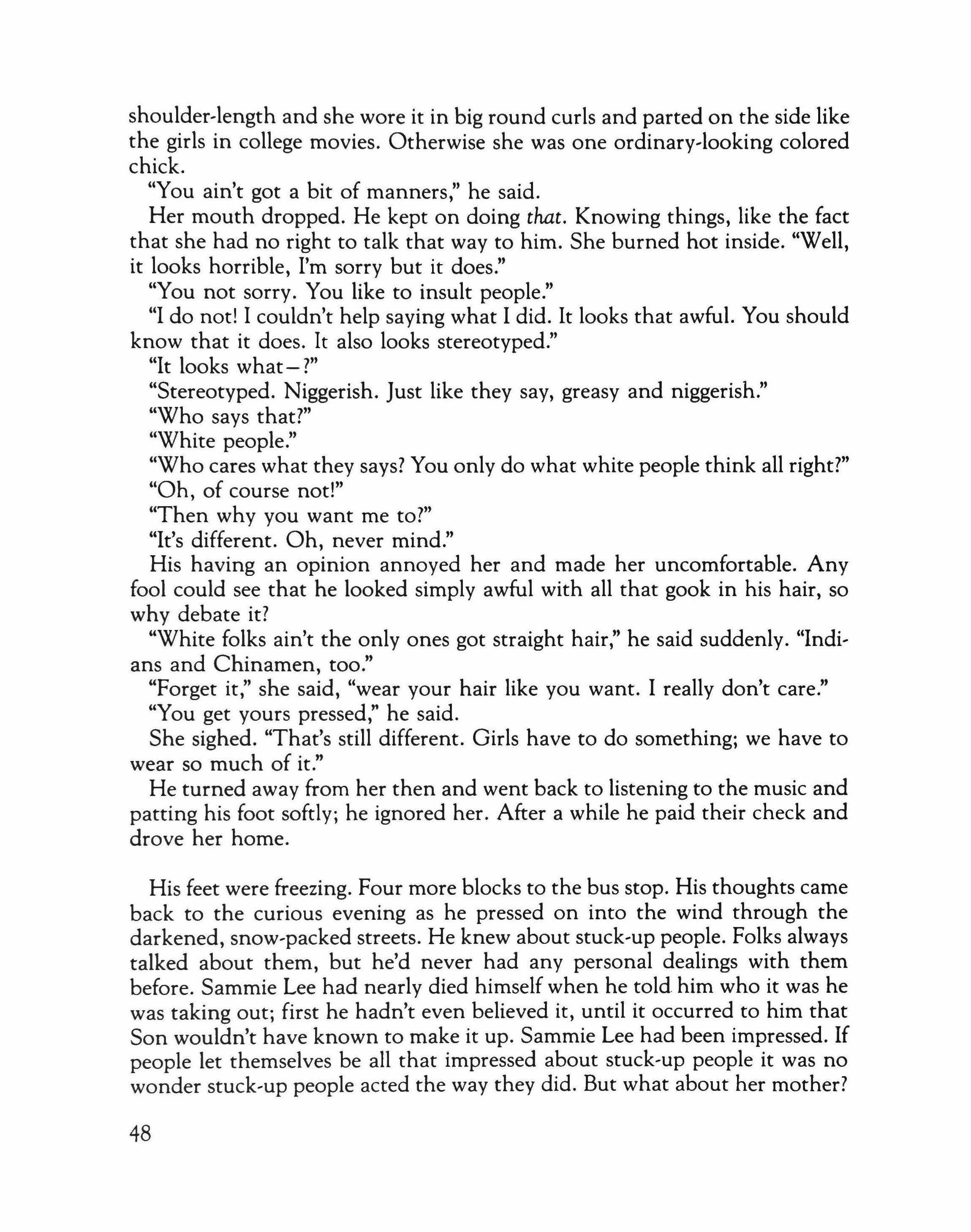
shoulder-length and she wore it in big round curls and parted on the side like the girls in college movies. Otherwise she was one ordinary-looking colored chick.
"You ain't got a bit of manners," he said. Her mouth dropped. He kept on doing that. Knowing things, like the fact that she had no right to talk that way to him. She burned hot inside. "Well, it looks horrible, I'm sorry but it does."
"You not sorry. You like to insult people."
"I do not! I couldn't help saying what I did. It looks that awful. You should know that it does. It also looks stereotyped."
"It looks what-?"
"Stereotyped. Niggerish. Just like they say, greasy and niggerish."
"Who says that?"
"White people."
"Who cares what they says? You only do what white people think all right?"
"Oh, of course not!"
"Then why you want me to?"
"It's different. Oh, never mind."
His having an opinion annoyed her and made her uncomfortable. Any fool could see that he looked simply awful with all that gook in his hair, so why debate it?
"White folks ain't the only ones got straight hair," he said suddenly. "Indians and Chinamen, too."
"Forget it," she said, "wear your hair like you want. I really don't care."
"You get yours pressed," he said.
She sighed. "That's still different. Girls have to do something; we have to wear so much of it."
He turned away from her then and went back to listening to the music and patting his foot softly; he ignored her. After a while he paid their check and drove her horne.
His feet were freezing. Four more blocks to the bus stop. His thoughts carne back to the curious evening as he pressed on into the wind through the darkened, snow-packed streets. He knew about stuck-up people. Folks always talked about them, but he'd never had any personal dealings with them before. Sammie Lee had nearly died himself when he told him who it was he was taking out; first he hadn't even believed it, until it occurred to him that Son wouldn't have known to make it up. Sammie Lee had been impressed. If people let themselves be all that impressed about stuck-up people it was no wonder stuck-up people acted the way they did. But what about her mother?

She seemed all right; he liked her mother but the girl was what Sammie Lee would call a drag.
Most of all he pondered what she had said about his not having pride. How could that be? He had fixed himself so carefully; as a matter of fact, he always went clean. In his work clothes, sure, but always clean. No matter how tired he was when he came home nights, he waited his turn for the tub; sometimes he fell asleep waiting and roused in the middle of the night for his bath. It was important to him. It was a thing he had got from his father, whose nightly ritual consisted of hauling and boiling water and soaking himself in the big tub near the stove; he would lie in the water and close his eyes and let out a long, long sigh. Son had got it from him.
Suddenly, as he neared the bus stop, he thought of Lottie in her room on Thirty-fifth Street. If she was even still there. It was strange, or was it just luck? Everywhere he had met such strangers: certain curious tender folk in the moments he had needed them, certain hands and eyes in the darkness of his journey. Not at all like this spooky one tonight.
Tomorrow, he decided, he would pick out a card and send it to Lottie. He smiled into the wind. The bus swung into sight and he ran for it.
In her room, Candace pulled off the nylons and stood looking in the mirror and then lay down, but she could not sleep.
She did not understand it. And would not for many years to come. Some, how Denmark Williams-this strange, proud, polite, incongruous youth, innocent as all get-out with his pointed shoes and his conked head, yet somehow unnervingly mature with that habit of his of saying things that made her know how little she knew - had gotten to her. At one moment in the car, stung by what she had said, he had faced her: "We got to get something straight, you and me, here and now. I don't know about you" - he was squinting at her in some kind of angry way - "but this here boy ain't got nothing in him want to be white. Nothing. You hear me? Nothing."
He had in the passion of his words taken hold of her wrist tightly and was leaning towards her; she felt by the pressure on her arm that he could snap it in two and that every muscle in his body had risen to help him make the statement. He terrified her in the moment and, curiously, sent a thrill of kindred fire racing through her.
That night he dreamed. About his pride. A panorama marched before him; masses surged across, there was a flag waving and valiant women held beautiful babies and pushed on. They were singing, some grand old spiritual, more noble than God, rising from a multitude of black folk. Someone up

ahead lifted his fist and they pressed on. The wagons moved. The legs, black and muscular, strained in the muck. And he was in the ranks, giving an arm here, a shoulder there, to those who faltered. There was no sobbing anymore but only the song, rising, swelling. Bugles blew, eyes glistened and the singing soared. He almost rose from his bed and his sleep, tears of happiness rolled from under his lids, and a proud smile spread across his face.
"Used to have showers!" Irving Brown roared at them standing in the middle ofthe room again in his rubber apron, turning about, shaking his fist. "When there was still white boys workin' here, there was showers! Used to have a little stove so's we could heat up soup! Noontimes, used to be able to heat up soup. How come we ain't got 'em now? 'Cause since he taken to hiring all colored he think he don't hafta! Don't have to give niggers nothin' cause they don't demand nothin',"
Some ofthe men looked at their shoes and others stared at whatever was in front of them.
"What," said Sammie Lee, putting down his food and folding his arms across his chest, "do you think we should do about it, man? I'm telling you I am tired of hearing this all the time. I don't care if you is crazy!"
Son turned about to find Willy Harper in the room. He was not there. There was silence in the room. He then looked at Nathan Bell; Nathan was reading a book about an exit. Son also wished that Irving Brown would stop talking all the time; as the months wore on he began to understand that the men knew everything that Irving Brown did, and were as miserable about it as he, but they felt they could do nothing and there was no point in grumbling. Still, his father and his mother and everyone he had ever known had said that old people had to be respected and Sammie Lee was a young man.
"You should be more respectful to the old, Sammie."
Heads turned slowly. Nathan looked up from his book and peered at Son. Astonishment hung in the room. Sammie Lee looked at Son in amazementthen a huge grin spread from ear to ear across his face.
"Look who's getting some juice in him! 01' country boy! Lord have mercy, that high,classed little girl must of given him some good pumpin', lissen to him!" He pushed Son roughly and laughingly, and as one the men joined in the teasing.
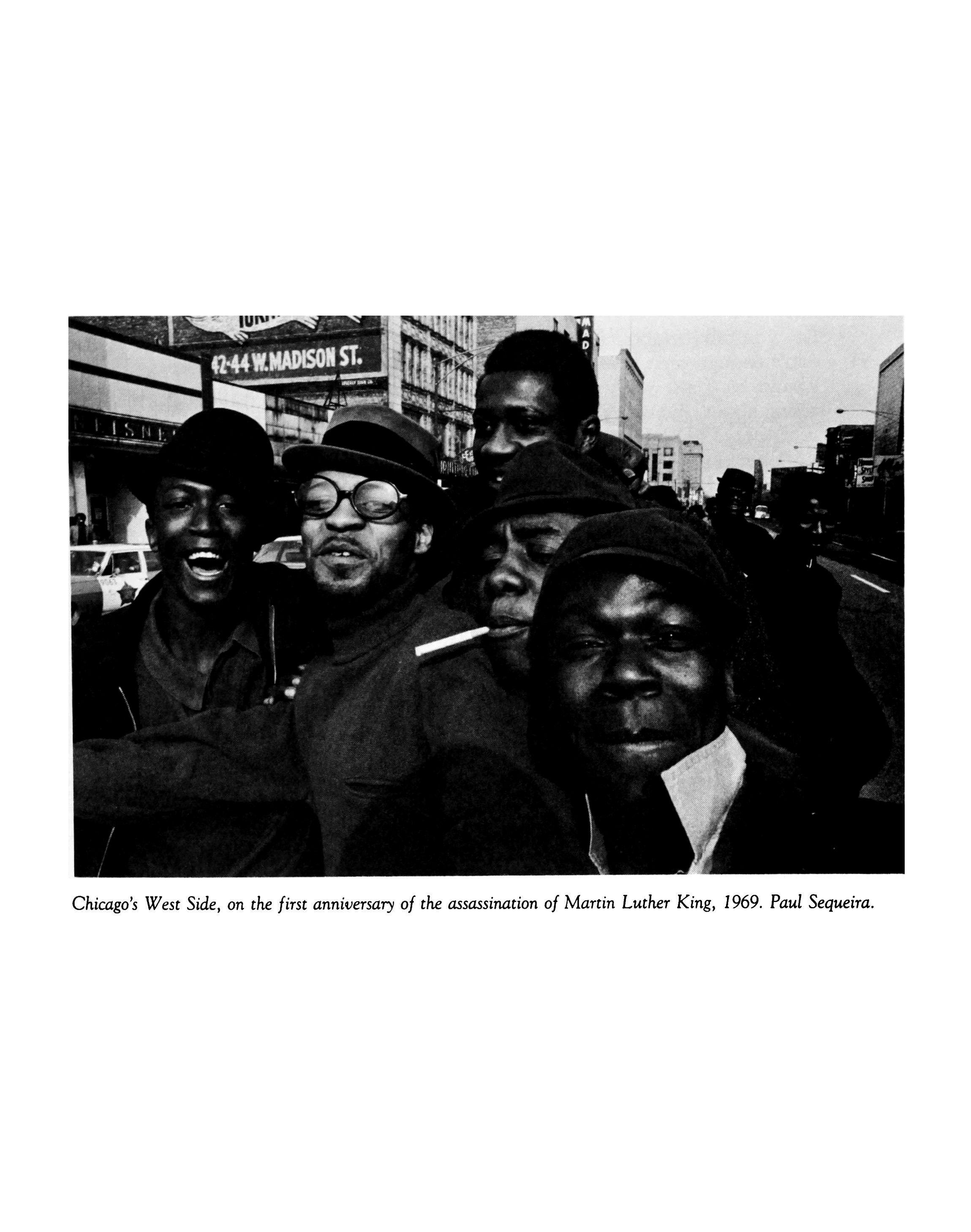
Chicago's West Side, on the first anniversary of the assassination of
Martin Luther King, 1969. Paul Sequeira.
Irving Brown's hands fell open-palmed to his sides in a gesture of hopeless' ness. "That's all," he said. "That's all you ever goin' to know how to do."
Nathan Bell adjusted his glasses and said at the end of a long, crisp sigh, "Just what is it that you would like for us to do, Mr. Brown?"
The old man shouted directly at him, his eyes sparkling to have finally got attention from Nathan: "Demand things! Demand a shower. They still got the stalls back there! All he gotta do is turn the water back on. Show 'em the black man wants what'd have to give the white boys, that's what I'm talking about."
"Are you talking about a sort of-union, Mr. Brown?"
"Ain't enough men here to have no union," one of the other men said. "Would be if we was to organize the other garages," Irving Brown said, wheeling about, his eyes popping with possibility.
"Who would organize it, Mr. Brown?" Nathan said with great interest now. Son felt excited.
"Us," Irving Brown shouted at him. "We could demand more money, too. Them white boys gets it. Right across the street, them white boys workin' in the Parkside gets more than we do."
"And that's just how come they ain't going to be organizing nothing 'cept to kick you ass, old man!" The men murmured agreement to the speaker. Sammie was yelling so hard he was stretching his neck. "You all fixing to let this crazy old man talk you into a good way to lose all your jobs! That's what! This ain't no damned fac'try or something. Mr. Airn'son do all right by me and with my tips I makes out all right and so do you. Better leave that man alone. Push a white man too far and he turn on you like a snake!"
The men howled impassioned assent and shook their heads up and down.
Irving Brown took off his rubber apron and was waving it at them. "You don't know how to fight for nothing, that's all! Black man thinks things is just goin' to fall in his lap, that's how come you ain't got nothing. Lookahere at this apron. You know how come we got these aprons, these here rubber aprons? Long time we only had cloth for the car washing. And them boys had colds all the time down there. And one of them caught his death from it, that's what. And you know what, them white boys took off them aprons one day and they just walked out on him when all the cars in the city was a' standing in line down there trying to get in. And you know what-?" Irving Brown, his eyes glistening, was screaming now, waving his apron triumphantly. "He got rubber aprons for them, that's what!"
"Yeah," said Sammie sullenly, "and two weeks later he fired every single one of them and got in colored. Why doncha tell that part?"

"But he don't try to make us work without rubber aprons, does he? He done learned that part forever, ain't he? Even with no-fight niggers he's scared to save his pennies thataway. That's what I'm trying to tell you!"
"1 know what you 'trying to tell us' and I'm telling you you ain't gonna get me in none of that." He wheeled around, glaring at the other men, "Go ahead, listen to him! Go ahead, see where it get you!"
The men went conspicuously back to their lunches and Nathan Bell read on.
"1 think perhaps it would be better in there," Nathan Bell said to Sandy Aronson, pointing to his private office.
Aronson scrutinized him. He had never cared much for Nathan. He dis, liked his manner and his way of talking. There was something about the boy's slender, nineteen-year-old frame in the attendant's overalls which struck Sandy as ludicrous in a way that should not be. He turned abruptly and walked into his office, leaving it to Nathan to push the door to behind them. He did not invite Nathan to sit down but took his own place behind the desk and drummed a pencil impatiently as he waited to hear what it was the boy was acting so important about.
"I don't," Nathan said, in his crisp way, "make it a practice to go around paying attention to other people's business, Mr. Aronson, but there are some things going on here that I thought you should know about."
Sandy stopped drumming and leaned forward. But he did it casually; he had not the least intention ofgiving Nathan's drama any sanction of urgency whatsoever.
"It's not the kind of thing 1 would especially want any of the men to know 1 discussed with you. They probably wouldn't understand that I did it for everyone's good."
Sandy wet his lips and waved down that part of the narrative, urging Nathan with the expression on his face to get on with it.
"As it is, nothing has really happened. But there is a certain atmosphere beginning to be created which could turn into something bad, I think."
"What is it, boy?" Aronson demanded.
"Well, I've worked here for almost two years and in most ways it's been very pleasant. But it has been hard for us to put up with some of the grumbling that goes on. But you figure where there are people, there's going to be grumbling, you know. But lately it's gotten-you know-funny."
"How-'funny'?"
"The grumbling. It's so much worse."
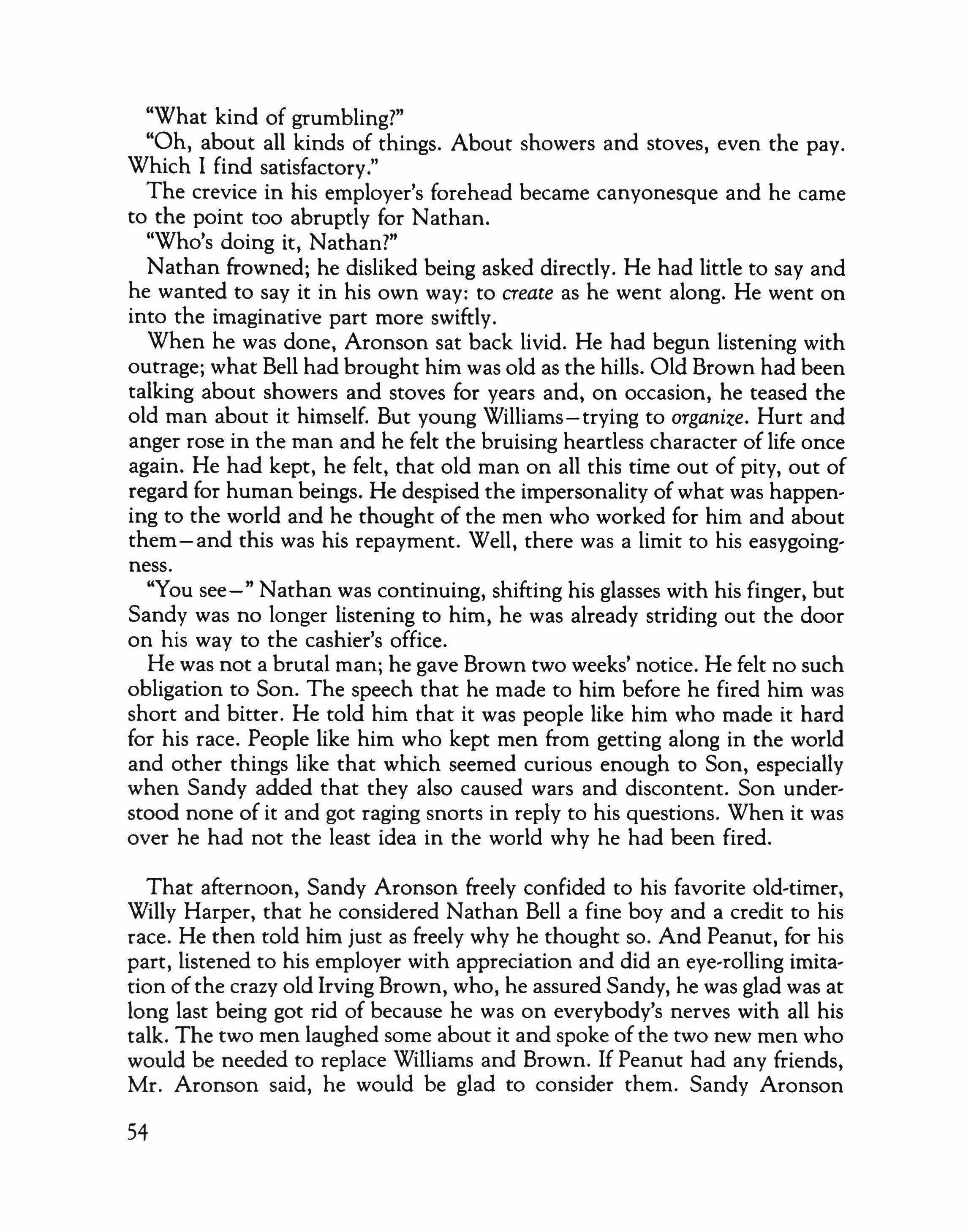
"What kind of grumbling?"
"Oh, about all kinds of things. About showers and stoves, even the pay. Which I find satisfactory."
The crevice in his employer's forehead became canyonesque and he came to the point too abruptly for Nathan.
"Who's doing it, Nathan?"
Nathan frowned; he disliked being asked directly. He had little to say and he wanted to say it in his own way: to create as he went along. He went on into the imaginative part more swiftly.
When he was done, Aronson sat back livid. He had begun listening with outrage; what Bell had brought him was old as the hills. Old Brown had been talking about showers and stoves for years and, on occasion, he teased the old man about it himself. But young Williams - trying to organize. Hurt and anger rose in the man and he felt the bruising heartless character of life once again. He had kept, he felt, that old man on all this time out of pity, out of regard for human beings. He despised the impersonality of what was happen, ing to the world and he thought of the men who worked for him and about them-and this was his repayment. Well, there was a limit to his easygoing, ness.
"You see-" Nathan was continuing, shifting his glasses with his finger, but Sandy was no longer listening to him, he was already striding out the door on his way to the cashier's office.
He was not a brutal man; he gave Brown two weeks' notice. He felt no such obligation to Son. The speech that he made to him before he fired him was short and bitter. He told him that it was people like him who made it hard for his race. People like him who kept men from getting along in the world and other things like that which seemed curious enough to Son, especially when Sandy added that they also caused wars and discontent. Son under, stood none of it and got raging snorts in reply to his questions. When it was over he had not the least idea in the world why he had been fired.
That afternoon, Sandy Aronson freely confided to his favorite old-timer, Willy Harper, that he considered Nathan Bell a fine boy and a credit to his race. He then told him just as freely why he thought so. And Peanut, for his part, listened to his employer with appreciation and did an eye-rolling imitation ofthe crazy old Irving Brown, who, he assured Sandy, he was glad was at long last being got rid of because he was on everybody's nerves with all his talk. The two men laughed some about it and spoke ofthe two new men who would be needed to replace Williams and Brown. If Peanut had any friends, Mr. Aronson said, he would be glad to consider them. Sandy Aronson
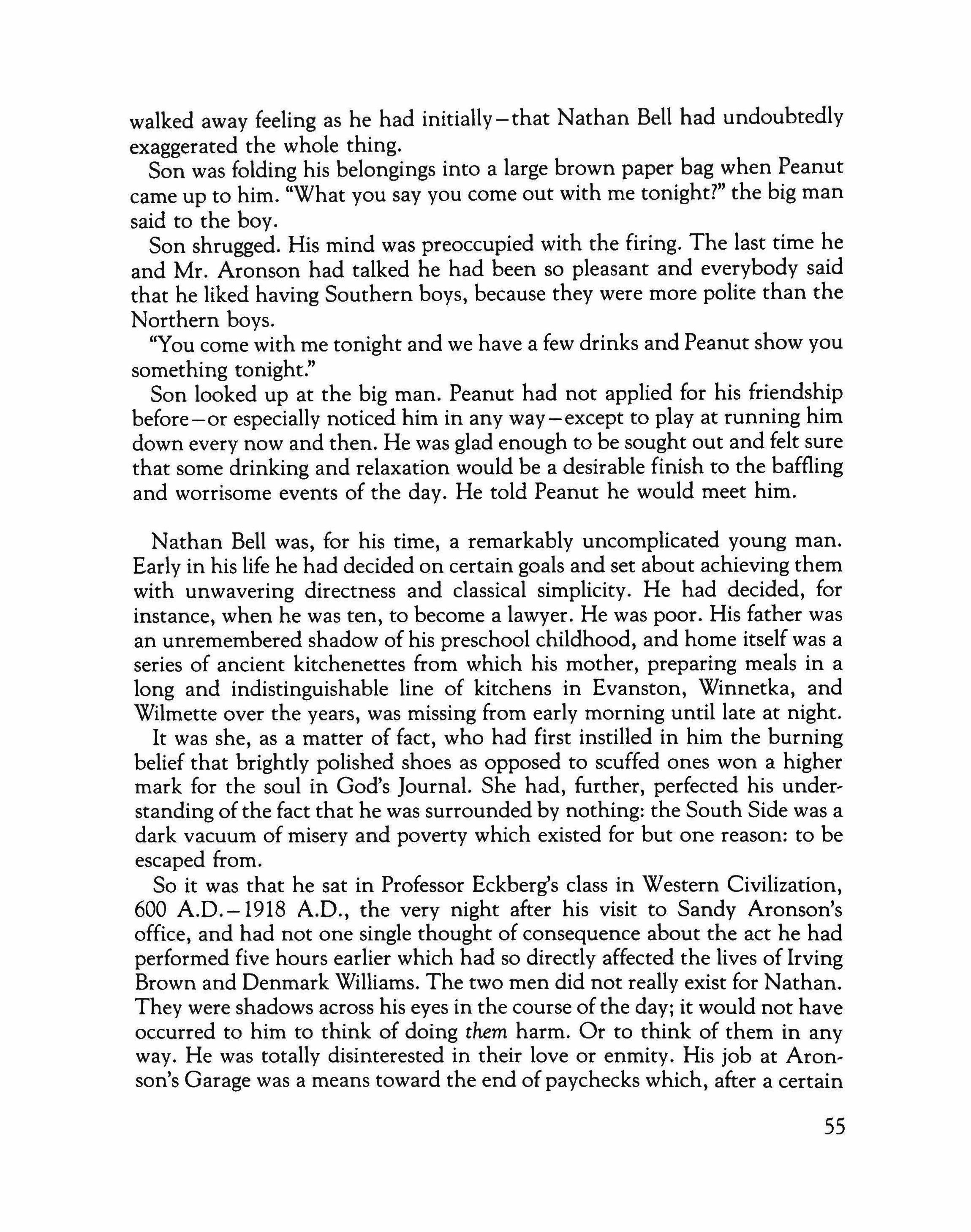
walked away feeling as he had initially-that Nathan Bell had undoubtedly exaggerated the whole thing.
Son was folding his belongings into a large brown paper bag when Peanut came up to him. "What you say you come out with me tonight?" the big man said to the boy.
Son shrugged. His mind was preoccupied with the firing. The last time he and Mr. Aronson had talked he had been so pleasant and everybody said that he liked having Southern boys, because they were more polite than the Northern boys.
"You come with me tonight and we have a few drinks and Peanut show you something tonight."
Son looked up at the big man. Peanut had not applied for his friendship before-or especially noticed him in any way-except to play at running him down every now and then. He was glad enough to be sought out and felt sure that some drinking and relaxation would be a desirable finish to the baffling and worrisome events of the day. He told Peanut he would meet him.
Nathan Bell was, for his time, a remarkably uncomplicated young man. Early in his life he had decided on certain goals and set about achieving them with unwavering directness and classical simplicity. He had decided, for instance, when he was ten, to become a lawyer. He was poor. His father was an unremembered shadow of his preschool childhood, and home itself was a series of ancient kitchenettes from which his mother, preparing meals in a long and indistinguishable line of kitchens in Evanston, Winnetka, and Wilmette over the years, was missing from early morning until late at night.
It was she, as a matter of fact, who had first instilled in him the burning belief that brightly polished shoes as opposed to scuffed ones won a higher mark for the soul in God's Journal. She had, further, perfected his under, standing of the fact that he was surrounded by nothing: the South Side was a dark vacuum of misery and poverty which existed for but one reason: to be escaped from.
So it was that he sat in Professor Eckberg's class in Western Civilization, 600 A.D.-1918 A.D., the very night after his visit to Sandy Aronson's office, and had not one single thought of consequence about the act he had performed five hours earlier which had so directly affected the lives of Irving Brown and Denmark Williams. The two men did not really exist for Nathan. They were shadows across his eyes in the course ofthe day; it would not have occurred to him to think of doing them harm. Or to think of them in any way. He was totally disinterested in their love or enmity. His job at Aronson's Garage was a means toward the end ofpaychecks which, after a certain

number of weeks-and considerable quantities of the poorest of groceriesfinally came to an accumulation that satisfied the bursar's office at the university. Thus, Sandy Aronson achieved, in Nathan's eyes the least mea, sure of a greater dimension only to the extent that his crude person com, manded only the particular means to one of Nathan's particular ends. Nathan was not interested in an increase; his objectives were long-range and epic. It would, indeed, be well into the spring before he would actually appear in his employer's office to instruct him that he needed days, un-docked days, to be spent in pre-finals week, from opening to closing in the Chicago Public Library. The number of days would be negotiable.
Nathan had approached his entire college career in the same manner. He had considered his strong and weak points with brilliantly honest discern, ment. To the good, by his measure, there was his unmistakable handsome, ness and capacity for unlimited ingratiation. He had, for instance, carefully singled out, in two years, those instructors and professors who were seem' ingly awarded most respect in the life of the university community, and got himselfprogrammed into their classes whenever possible at whatever expense of red tape and explanation it might take in the registrar's office. Once so calendared, Nathan engaged in apple-polishing as if it were his vocationwhich, in fact, it was.
After two years, two minor professors and one rising young instructor had utterly succumbed to his campaigns and he was invariably known in their departments as- "that really dedicated colored student Bell."
But his summa cum was to be Dr. Frederik W. Eckberg. He had already on one occasion enjoyed an invitation to Professor Eckberg's home and drunk endless cups of Mrs. Eckberg's heady Scandinavian punch and listened to the good professor expound for several tuition-free hours on his greatest love: the Cromwellian Era.
But of his negative points Nathan was not less discerning. He had studied the fact of his being a Negro in a decidedly white supremacist culture and concluded with characteristic realism that it was an irrevocability and further thought should not be wasted upon that piece of indestructible reality. He came, therefore, to concentrate on a second drawback, which he regarded as more serious: that his capacity for the actual absorption and application of knowledge was limited. His classes bored him to distraction, as indeed did personalities such as poor Professor Eckberg, but he quite understood that he had to endure it and hence, with the diligence of a mason with mortar, he applied his mind to the acquisition of every major fact in European history. As for the ideas which underlay or had evolved from those facts-ideas vaguely touched on in lecture and text, but which for obscure reasons
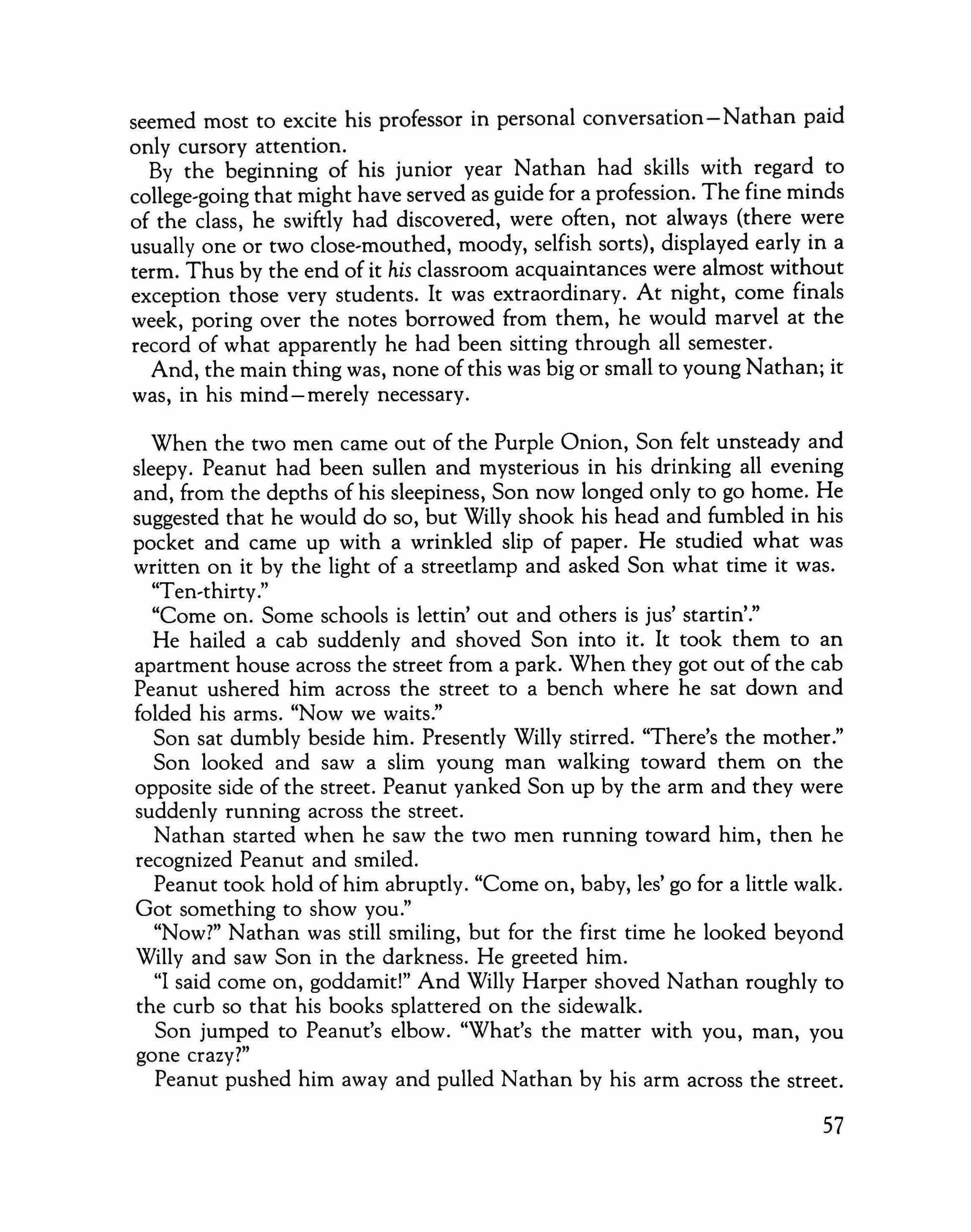
seemed most to excite his professor in personal conversation-Nathan paid only cursory attention.
By the beginning of his junior year Nathan had skills with regard to college-going that might have served as guide for a profession. The fine minds of the class, he swiftly had discovered, were often, not always (there were usually one or two close-mouthed, moody, selfish sorts), displayed early in a term. Thus by the end of it his classroom acquaintances were almost without exception those very students. It was extraordinary. At night, come finals week, poring over the notes borrowed from them, he would marvel at the record of what apparently he had been sitting through all semester.
And, the main thing was, none ofthis was big or small to young Nathan; it was, in his mind-merely necessary.
When the two men came out of the Purple Onion, Son felt unsteady and sleepy. Peanut had been sullen and mysterious in his drinking all evening and, from the depths of his sleepiness, Son now longed only to go home. He suggested that he would do so, but Willy shook his head and fumbled in his pocket and came up with a wrinkled slip of paper. He studied what was written on it by the light of a streetlamp and asked Son what time it was.
"Ten-thirty,"
"Come on. Some schools is lettin' out and others is jus' startin'."
He hailed a cab suddenly and shoved Son into it. It took them to an apartment house across the street from a park. When they got out of the cab Peanut ushered him across the street to a bench where he sat down and folded his arms. "Now we waits."
Son sat dumbly beside him. Presently Willy stirred. "There's the mother."
Son looked and saw a slim young man walking toward them on the opposite side of the street. Peanut yanked Son up by the arm and they were suddenly running across the street.
Nathan started when he saw the two men running toward him, then he recognized Peanut and smiled.
Peanut took hold of him abruptly. "Come on, baby, les' go for a little walk. Got something to show you."
"Now?" Nathan was still smiling, but for the first time he looked beyond Willy and saw Son in the darkness. He greeted him.
"I said come on, goddamitl" And Willy Harper shoved Nathan roughly to the curb so that his books splattered on the sidewalk.
Son jumped to Peanut's elbow. "What's the matter with you, man, you gone crazy?"
Peanut pushed him away and pulled Nathan by his arm across the street.

Son gathered up the boy's books and followed after them into the park. Peanut led them to a tiny dark clearing in the trees just on the other side of the tennis courts which bordered the park. He took off his jacket while Son stood open-mouthed trying to get a soberized understanding of what was happening. Nathan had started to back off from the big crazy man in terror.
"If you runs, nigger, I kill you," Peanut said with a strange mad simplicity in the dark. Then he grinned and walked as close as possible to the youth. "Ain't goin' to hurt much. Jus' goin' to teach you something, 'cause you one ignorant nigger to be so educated."
Valor flashed through the boy and he ripped off his own jacket. "I don't know what's the matter with you-but if you want to fight-"
Even through his drunkenness Son could hear the terrible fear quavering along the lines of the voice.
Willy Harper roared at Nathan then: "That's right, that's what I want to see! Show me some fight! Show me some goddamned fight! You goddamned white folks' ass-lickin' son of a bitch!"
He moved in on the boy then and held his fist up to Nathan's eyes. "You see that, black boy? You know what that is?"
Nathan eyes strained at the collected fist which was the size of a small melon.
"You know what that is?" - Willy boomed again in the dark - "That is a black fist!" He grabbed Nathan and drew him to him so violently that the fabric of the youth's shirt ripped. "Come here, Son! Come here!"
Son ran beside them and with his free hand Willy Harper shoved Denmark Williams face to face with Nathan. "Look at him, look at him good:' he told Nathan, "'cause it's learnin' time tonight, baby! Look here at this black boy's face, black boy - and learn something." He held them together a second longer while Nathan turned his eyes wildly from one to the other. Willy Harper hurled Son away from them.
"You know what he done?" he asked of Son.
Son shook his head, not believing or understanding anything he was seeing.
"He done run, tol' The Man what the nigger is talkin' 'bout!"
Nathan Bell understood. With a mighty jerk he tried in one desperate wrench to loose himself from the man; a plaintive plea tore from his lips. Willy held onto him. And then - the great fist came smashing down full center on his face and he reeled backward to the grass in a wild half-arc.
Willy Harper stood over him. "Get up."
Nathan shook his head drunkenly and pawed at his bloody shirt. He reached out vaguely to the wide-eyed stupified Son, who half danced with fear and excitement between them.
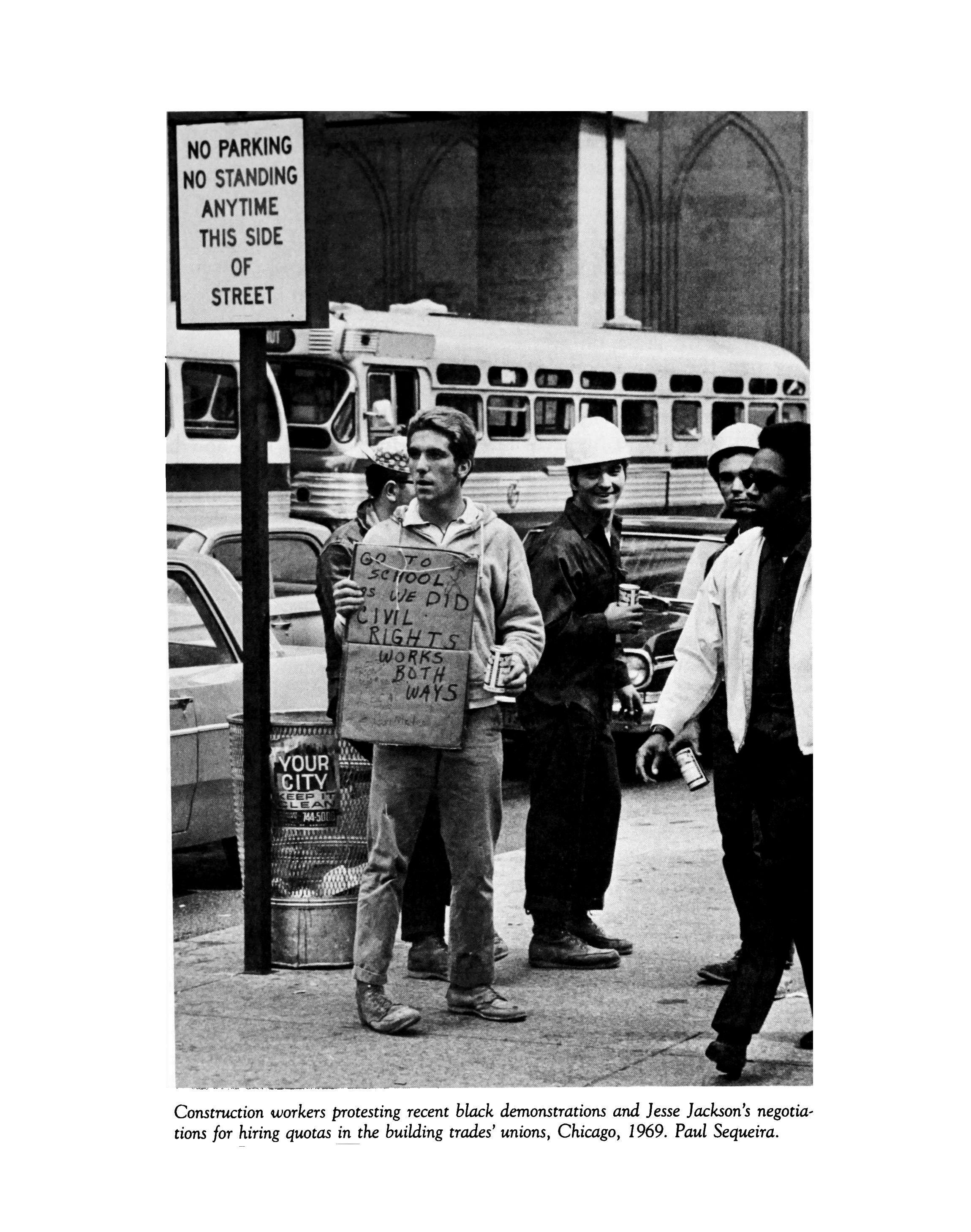
NO PARKING NO STANDING ANYTIME THIS SIDE OF STREET
Construction workers protesting recent black demonstrations and Jesse Jackson's negotiations for �iring quotas in the building trades' unions, Chicago, 1969. Paul Sequeira.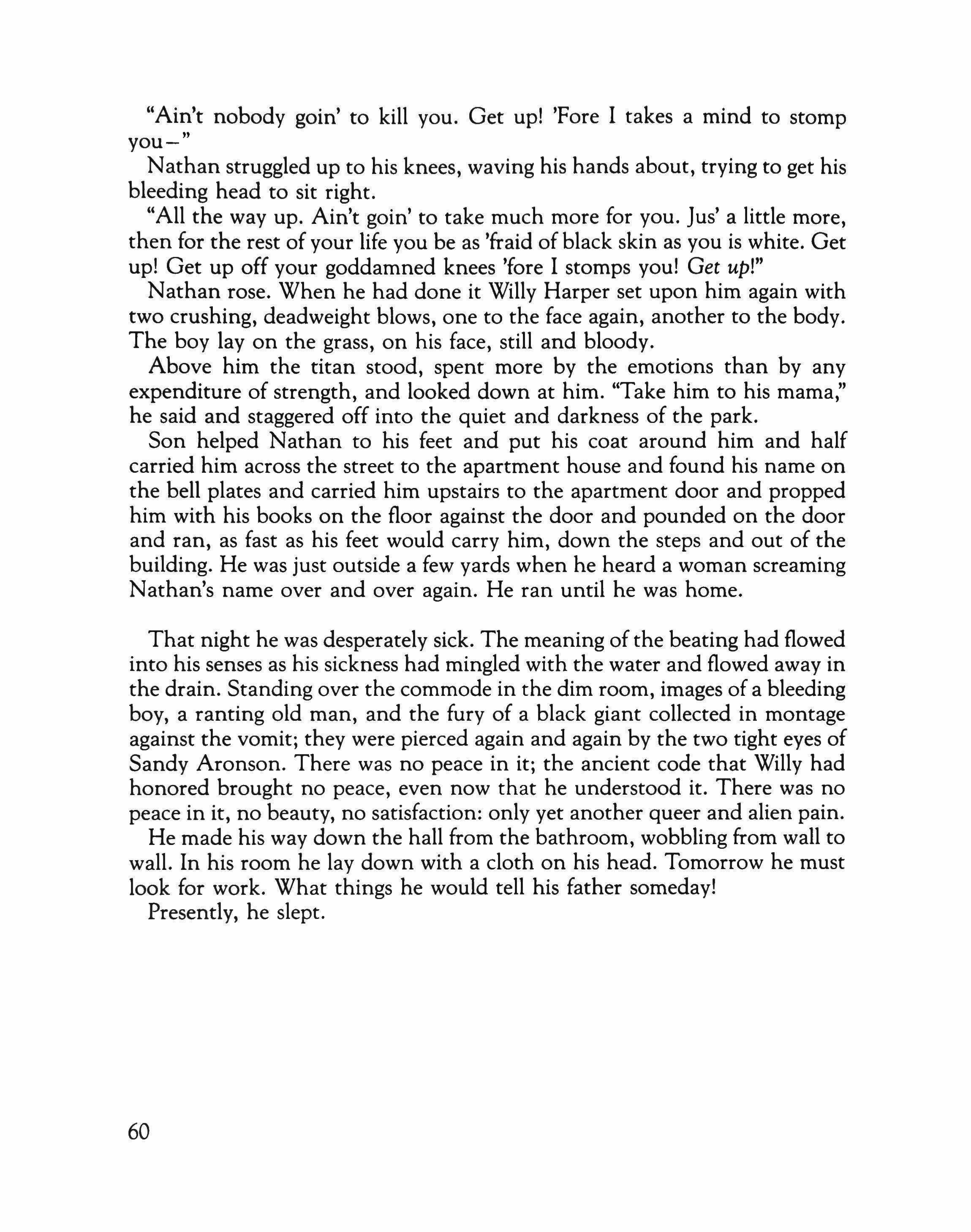
"Ain't nobody goin' to kill you. Get up! 'Fore I takes a mind to stomp you-"
Nathan struggled up to his knees, waving his hands about, trying to get his bleeding head to sit right.
"All the way up. Ain't goin' to take much more for you. Jus' a little more, then for the rest of your life you be as 'fraid of black skin as you is white. Get up! Get up off your goddamned knees 'fore I stomps you! Get up!"
Nathan rose. When he had done it Willy Harper set upon him again with two crushing, deadweight blows, one to the face again, another to the body. The boy lay on the grass, on his face, still and bloody.
Above him the titan stood, spent more by the emotions than by any expenditure of strength, and looked down at him. "Take him to his mama," he said and staggered off into the quiet and darkness of the park.
Son helped Nathan to his feet and put his coat around him and half carried him across the street to the apartment house and found his name on the bell plates and carried him upstairs to the apartment door and propped him with his books on the floor against the door and pounded on the door and ran, as fast as his feet would carry him, down the steps and out of the building. He was just outside a few yards when he heard a woman screaming Nathan's name over and over again. He ran until he was home.
That night he was desperately sick. The meaning of the beating had flowed into his senses as his sickness had mingled with the water and flowed away in the drain. Standing over the commode in the dim room, images of a bleeding boy, a ranting old man, and the fury of a black giant collected in montage against the vomit; they were pierced again and again by the two tight eyes of Sandy Aronson. There was no peace in it; the ancient code that Willy had honored brought no peace, even now that he understood it. There was no peace in it, no beauty, no satisfaction: only yet another queer and alien pain. He made his way down the hall from the bathroom, wobbling from wall to wall. In his room he lay down with a cloth on his head. Tomorrow he must look for work. What things he would tell his father someday!
Presently, he slept.
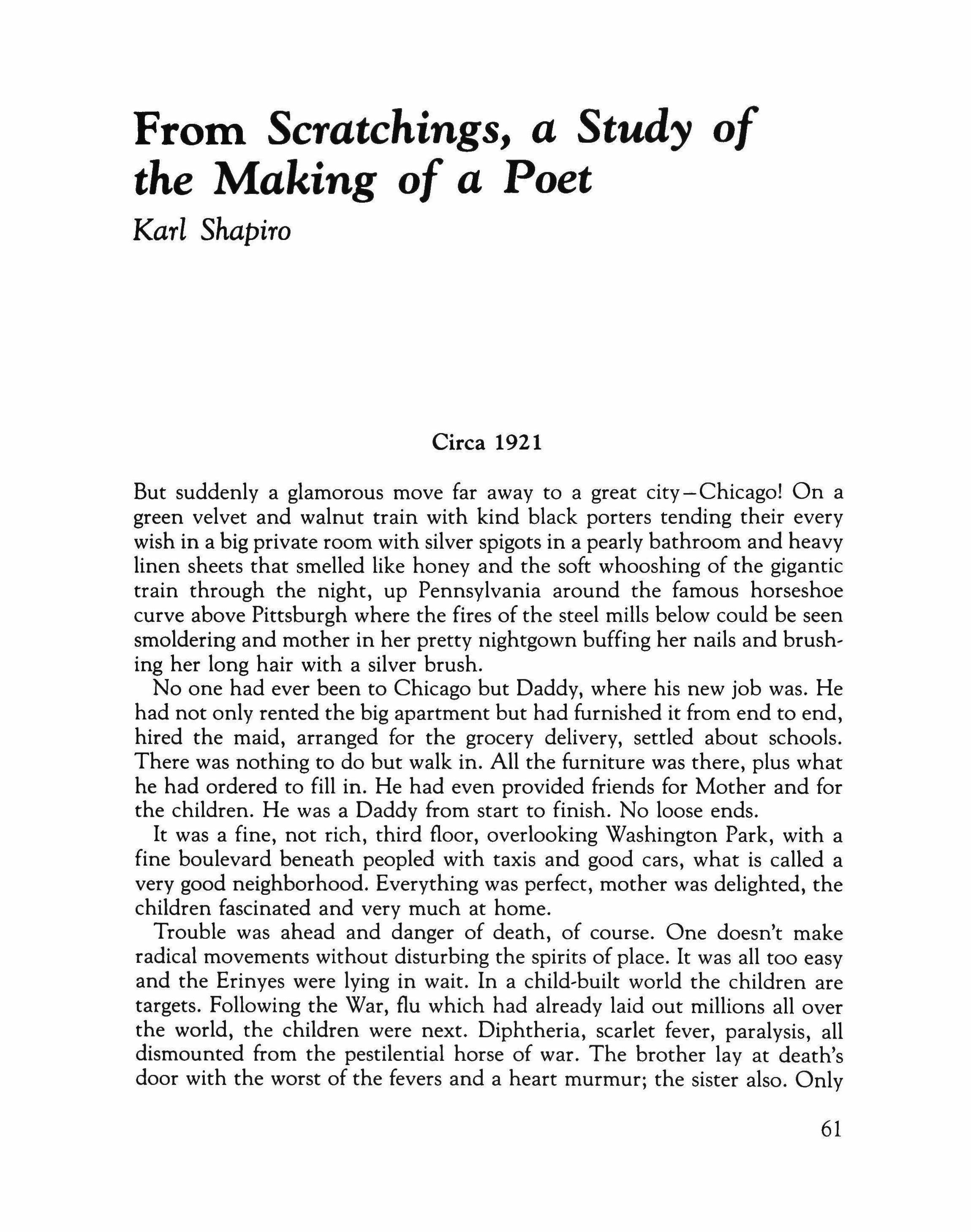
Circa 1921
But suddenly a glamorous move far away to a great city-Chicago! On a green velvet and walnut train with kind black porters tending their every wish in a big private room with silver spigots in a pearly bathroom and heavy linen sheets that smelled like honey and the soft whooshing of the gigantic train through the night, up Pennsylvania around the famous horseshoe curve above Pittsburgh where the fires of the steel mills below could be seen smoldering and mother in her pretty nightgown buffing her nails and brush, ing her long hair with a silver brush.
No one had ever been to Chicago but Daddy, where his new job was. He had not only rented the big apartment but had furnished it from end to end, hired the maid, arranged for the grocery delivery, settled about schools. There was nothing to do but walk in. All the furniture was there, plus what he had ordered to fill in. He had even provided friends for Mother and for the children. He was a Daddy from start to finish. No loose ends.
It was a fine, not rich, third floor, overlooking Washington Park, with a fine boulevard beneath peopled with taxis and good cars, what is called a very good neighborhood. Everything was perfect, mother was delighted, the children fascinated and very much at home.
Trouble was ahead and danger of death, of course. One doesn't make radical movements without disturbing the spirits of place. It was all too easy and the Erinyes were lying in wait. In a child-built world the children are targets. Following the War, flu which had already laid out millions all over the world, the children were next. Diphtheria, scarlet fever, paralysis, all dismounted from the pestilential horse of war. The brother lay at death's door with the worst of the fevers and a heart murmur; the sister also. Only

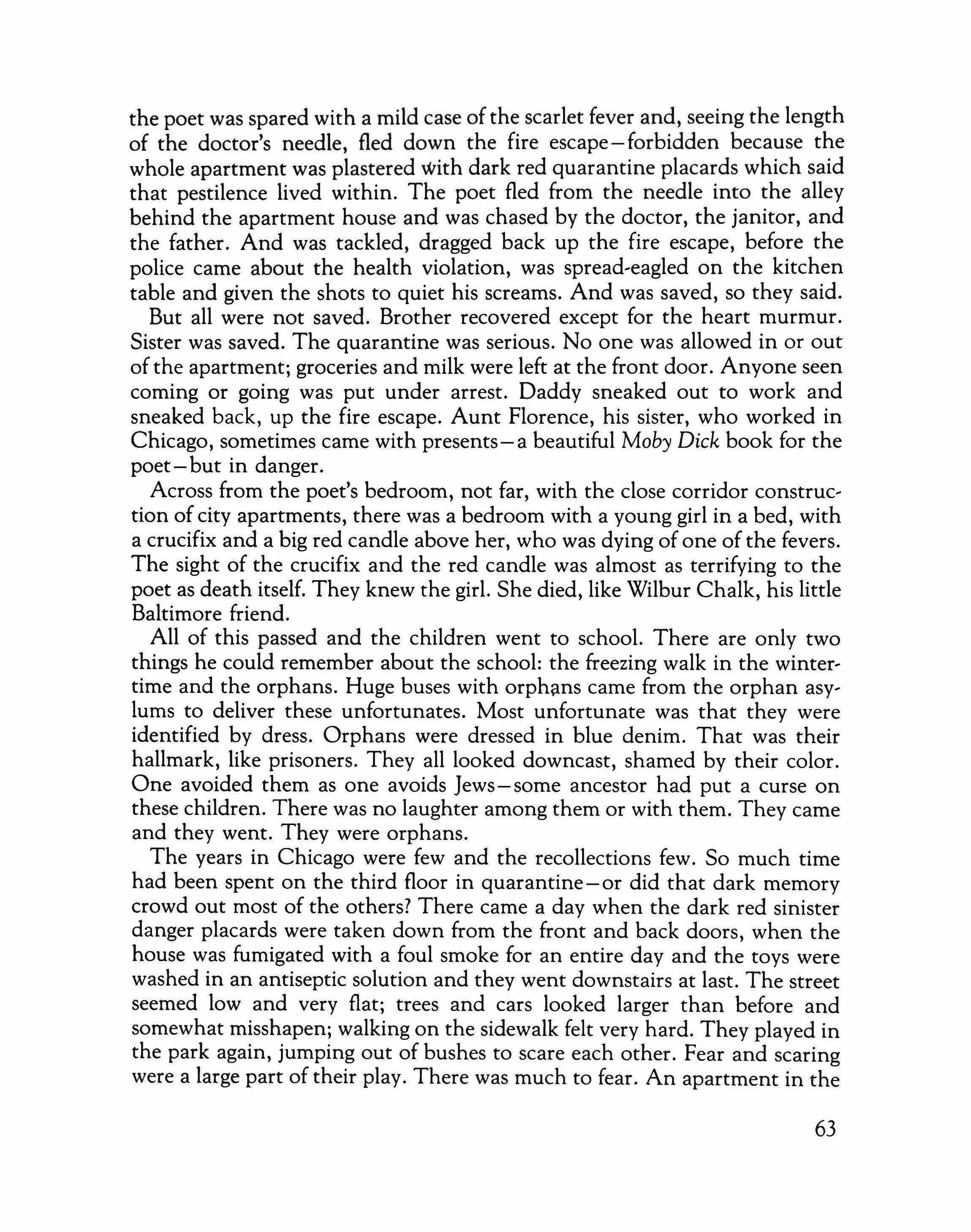
the poet was spared with a mild case ofthe scarlet fever and, seeing the length of the doctor's needle, fled down the fire escape-forbidden because the whole apartment was plastered with dark red quarantine placards which said that pestilence lived within. The poet fled from the needle into the alley behind the apartment house and was chased by the doctor, the janitor, and the father. And was tackled, dragged back up the fire escape, before the police came about the health violation, was spread-eagled on the kitchen table and given the shots to quiet his screams. And was saved, so they said.
But all were not saved. Brother recovered except for the heart murmur. Sister was saved. The quarantine was serious. No one was allowed in or out ofthe apartment; groceries and milk were left at the front door. Anyone seen coming or going was put under arrest. Daddy sneaked out to work and sneaked back, up the fire escape. Aunt Florence, his sister, who worked in Chicago, sometimes came with presents-a beautiful Moby Dick book for the poet - but in danger.
Across from the poet's bedroom, not far, with the close corridor construe, tion of city apartments, there was a bedroom with a young girl in a bed, with a crucifix and a big red candle above her, who was dying of one of the fevers. The sight of the crucifix and the red candle was almost as terrifying to the poet as death itself. They knew the girl. She died, like Wilbur Chalk, his little Baltimore friend.
All of this passed and the children went to school. There are only two things he could remember about the school: the freezing walk in the winter' time and the orphans. Huge buses with orphans came from the orphan asvlums to deliver these unfortunates. Most unfortunate was that they were identified by dress. Orphans were dressed in blue denim. That was their hallmark, like prisoners. They all looked downcast, shamed by their color. One avoided them as one avoids Jews-some ancestor had put a curse on these children. There was no laughter among them or with them. They came and they went. They were orphans.
The years in Chicago were few and the recollections few. So much time had been spent on the third floor in quarantine-or did that dark memory crowd out most of the others? There came a day when the dark red sinister danger placards were taken down from the front and back doors, when the house was fumigated with a foul smoke for an entire day and the toys were washed in an antiseptic solution and they went downstairs at last. The street seemed low and very flat; trees and cars looked larger than before and somewhat misshapen; walking on the sidewalk felt very hard. They played in the park again, jumping out of bushes to scare each other. Fear and scaring were a large part of their play. There was much to fear. An apartment in the

next block south was bombed because a Negro doctor had moved in, out of the vast black continent which occupied miles of the city below them. The Negro doctor stayed.
The grown-ups reveled in the gang wars that rocked the world but which were of Chicago manufacture of course. One took a certain pride in it. And a young bright college student was found murdered in the park and a pair of eyeglasses found by the detectives led to the two young murderers, also bright young college students, rich, Jews. All were Jews, rich Jews, and the grown-ups were deeply ashamed and self-conscious and endlessly analytical, sotto voce for the most part, for there was a dark and dirty scandal in the gratuitous murder, a curse on the Jews by the Jews. The Loeb-Leopold case, as it was dubbed, turned everybody into philosophers and added another poisoned spike to Chicago's crown.
And one hot summer day a little friend of the poet's got lost in the park and his life was feared for. Police and family and a small mob of the curious searched every bush, the lost child's mother being supported by friends until she fainted on the grass and had to be revived with shouts and splashes of water and from somewhere smelling salts. The young poet watched in horror. He had never seen anyone faint before. It was after dark when the lost child was discovered on the far side of the park, playing in an enormous sandbox, untended and unharmed.
The children were introduced to radio, invited upstairs by a kindly jeweler named Goldberg, who was surrounded by black boxes covered with dozens of dials and which emitted the delicate sweetish smell of bakelite and electricity. He put earphones on their heads and they could hear jazz music from the Edgewater Beach Hotel, at least fifteen miles away! Almost half a century later the poet and his wife rented an apartment on the North Side of the city, an apartment which was being vacated by Loebs of the historically notorious family. Everyone knew this by osmosis, as it were, and it did not call for discussion. By one of those laws of contrariety which make the world go round, the name had in effect become ennobled by darkness, a blot on the scutcheon, gules gleaming out of the exciting and meretricious twenties, the gay blood-spattered twenties. He even discovered a clothes box high up and far back in one of the dozens of closets, unseen because it looked like part of the shelving, and containing rich elegant lingerie of that era, part of the lady's trousseau perhaps, lovely laces and spidery silks that touch the intimate secrets of the body. They thought to return the box but never got around to it.
Chicago was coming to an end. The poet cannot remember regretting the announcement that they were moving again. Moving was natural. Again it
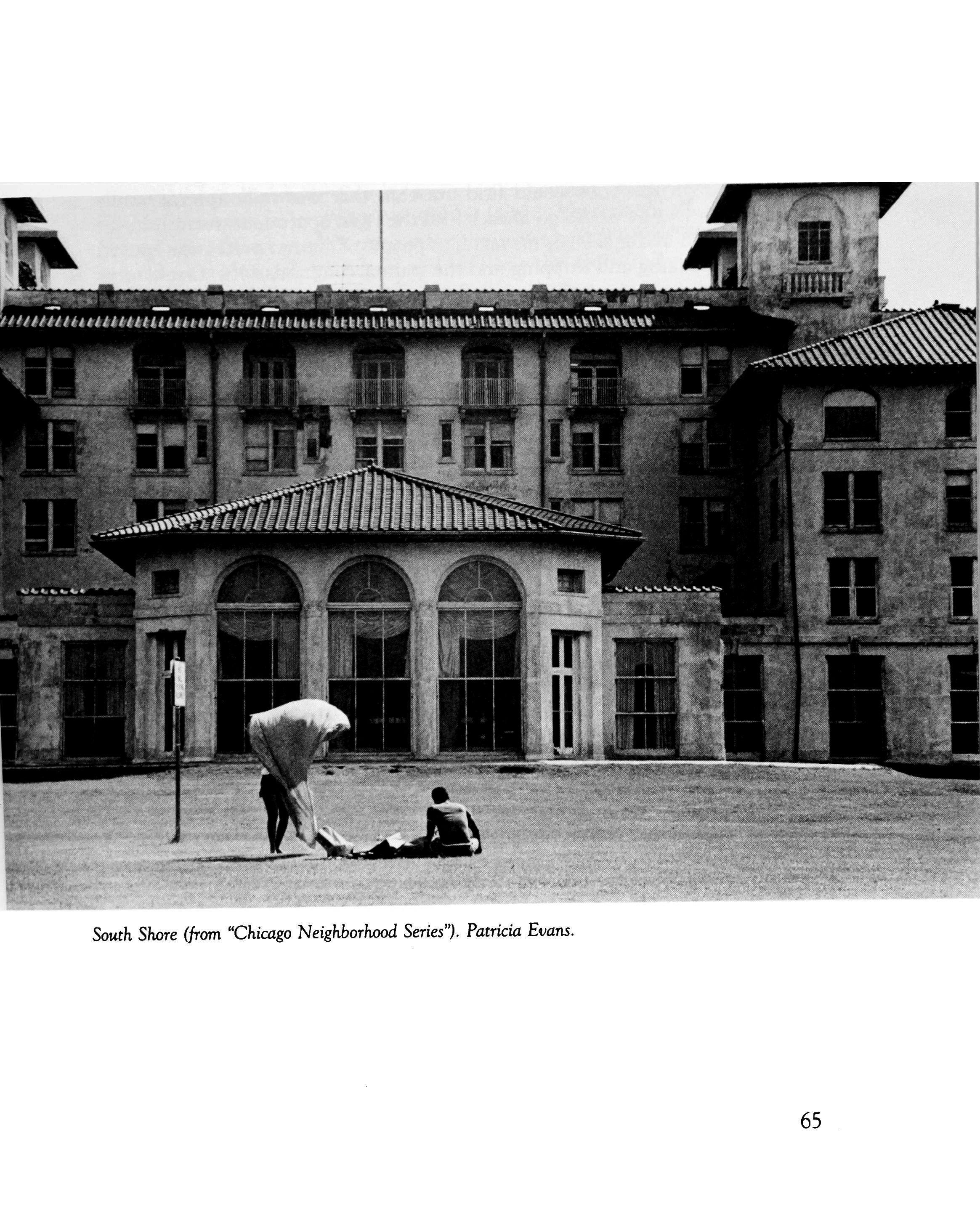
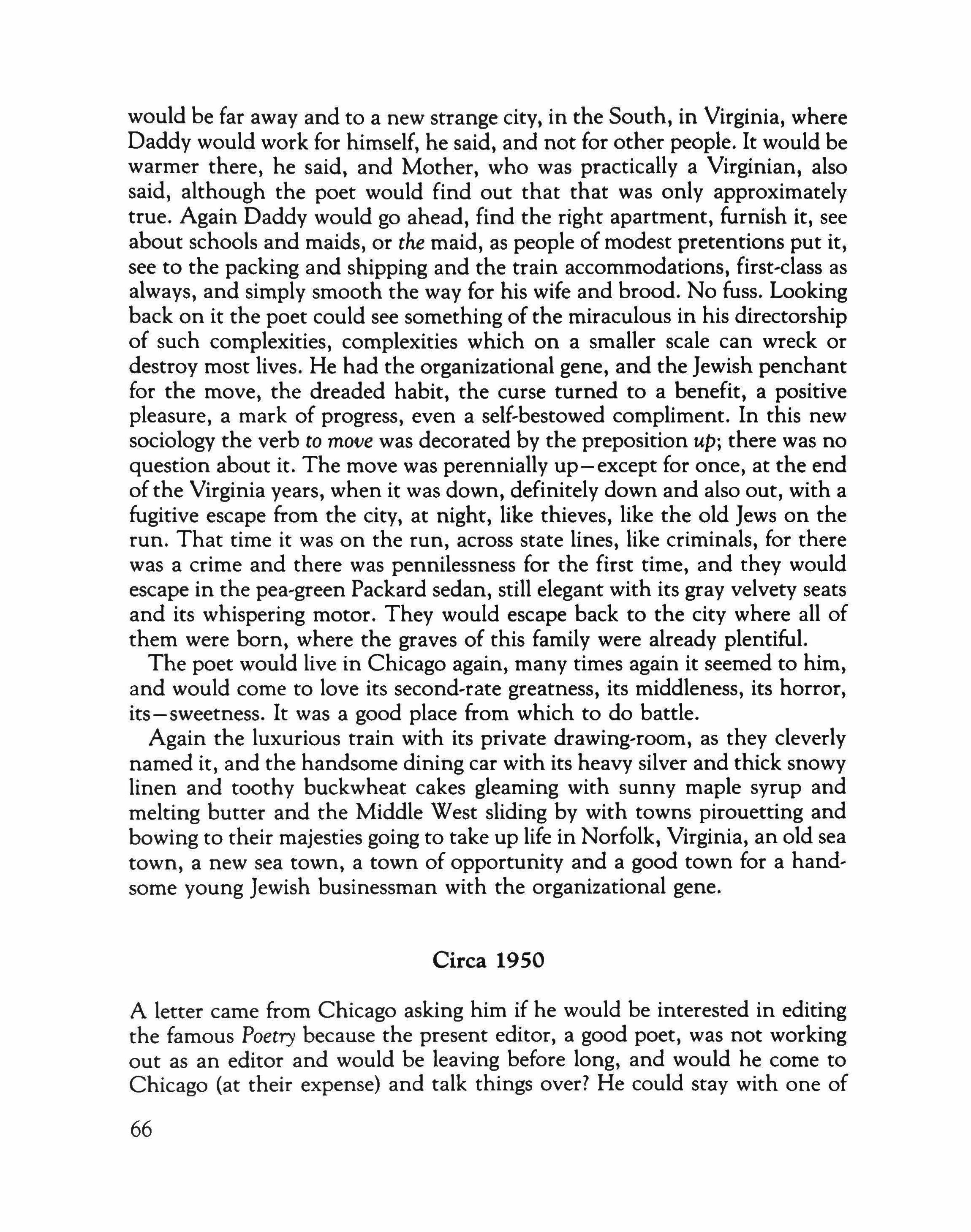
would be far away and to a new strange city, in the South, in Virginia, where Daddy would work for himself, he said, and not for other people. It would be warmer there, he said, and Mother, who was practically a Virginian, also said, although the poet would find out that that was only approximately true. Again Daddy would go ahead, find the right apartment, furnish it, see about schools and maids, or the maid, as people of modest pretentions put it, see to the packing and shipping and the train accommodations, first-class as always, and simply smooth the way for his wife and brood. No fuss. Looking back on it the poet could see something of the miraculous in his directorship of such complexities, complexities which on a smaller scale can wreck or destroy most lives. He had the organizational gene, and the Jewish penchant for the move, the dreaded habit, the curse turned to a benefit, a positive pleasure, a mark of progress, even a self-bestowed compliment. In this new sociology the verb to move was decorated by the preposition up; there was no question about it. The move was perennially up-except for once, at the end ofthe Virginia years, when it was down, definitely down and also out, with a fugitive escape from the city, at night, like thieves, like the old Jews on the run. That time it was on the run, across state lines, like criminals, for there was a crime and there was pennilessness for the first time, and they would escape in the pea-green Packard sedan, still elegant with its gray velvety seats and its whispering motor. They would escape back to the city where all of them were born, where the graves of this family were already plentiful.
The poet would live in Chicago again, many times again it seemed to him, and would come to love its second-rare greatness, its middleness, its horror, its - sweetness. It was a good place from which to do battle.
Again the luxurious train with its private drawing-room, as they cleverly named it, and the handsome dining car with its heavy silver and thick snowy linen and toothy buckwheat cakes gleaming with sunny maple syrup and melting butter and the Middle West sliding by with towns pirouetting and bowing to their majesties going to take up life in Norfolk, Virginia, an old sea town, a new sea town, a town of opportunity and a good town for a hand, some young Jewish businessman with the organizational gene.
Circa 1950
A letter came from Chicago asking him if he would be interested in editing the famous Poetry because the present editor, a good poet, was not working out as an editor and would be leaving before long, and would he come to Chicago (at their expense) and talk things over? He could stay with one of
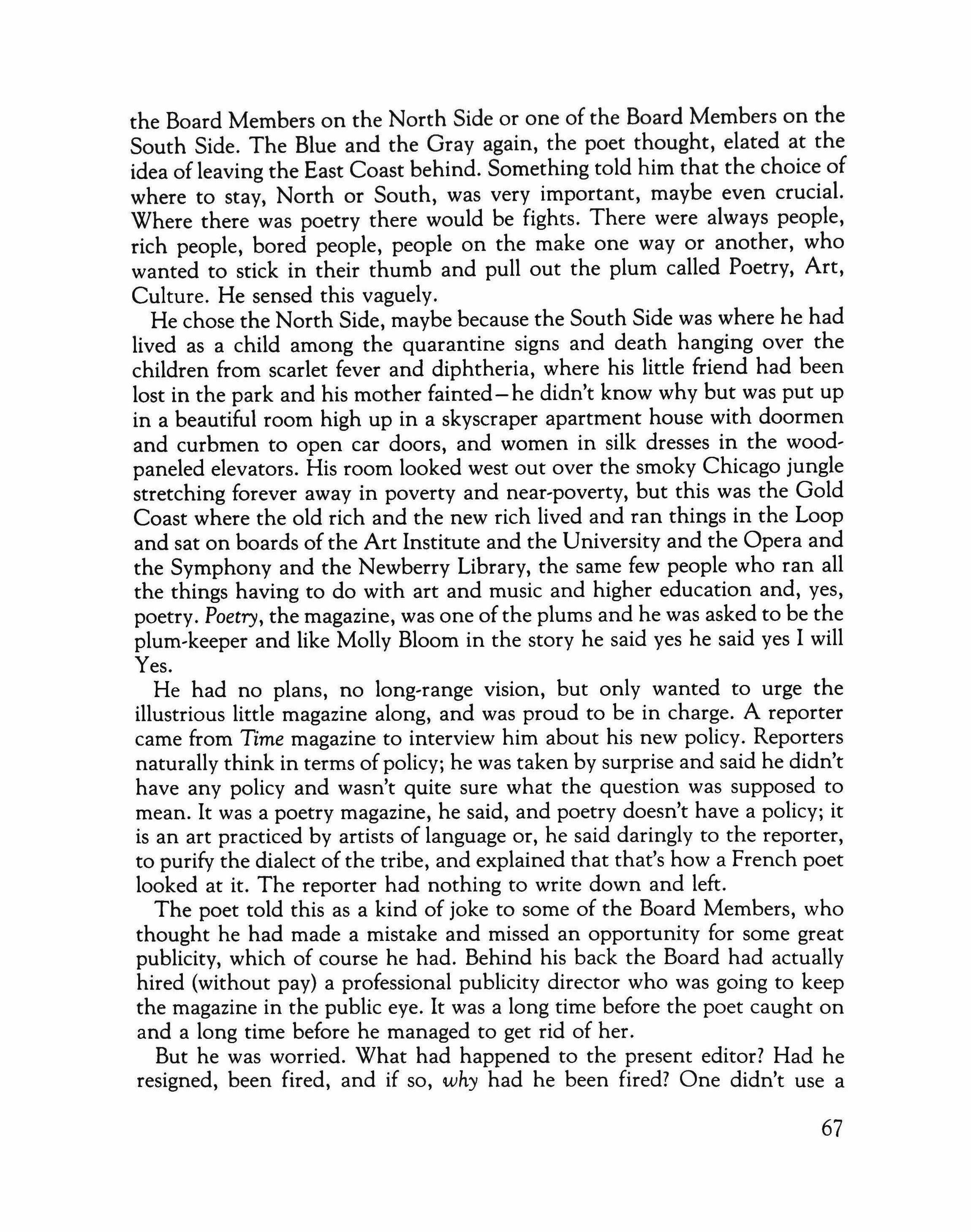
the Board Members on the North Side or one of the Board Members on the South Side. The Blue and the Gray again, the poet thought, elated at the idea of leaving the East Coast behind. Something told him that the choice of where to stay, North or South, was very important, maybe even crucial. Where there was poetry there would be fights. There were always people, rich people, bored people, people on the make one way or another, who wanted to stick in their thumb and pull out the plum called Poetry, Art, Culture. He sensed this vaguely.
He chose the North Side, maybe because the South Side was where he had lived as a child among the quarantine signs and death hanging over the children from scarlet fever and diphtheria, where his little friend had been lost in the park and his mother fainted - he didn't know why but was put up in a beautiful room high up in a skyscraper apartment house with doormen and curbmen to open car doors, and women in silk dresses in the wood, paneled elevators. His room looked west out over the smoky Chicago jungle stretching forever away in poverty and near-poverty, but this was the Gold Coast where the old rich and the new rich lived and ran things in the Loop and sat on boards of the Art Institute and the University and the Opera and the Symphony and the Newberry Library, the same few people who ran all the things having to do with art and music and higher education and, yes, poetry. Poetry, the magazine, was one ofthe plums and he was asked to be the plum-keeper and like Molly Bloom in the story he said yes he said yes I will Yes.
He had no plans, no long-range vision, but only wanted to urge the illustrious little magazine along, and was proud to be in charge. A reporter came from Time magazine to interview him about his new policy. Reporters naturally think in terms of policy; he was taken by surprise and said he didn't have any policy and wasn't quite sure what the question was supposed to mean. It was a poetry magazine, he said, and poetry doesn't have a policy; it is an art practiced by artists of language or, he said daringly to the reporter, to purify the dialect of the tribe, and explained that that's how a French poet looked at it. The reporter had nothing to write down and left.
The poet told this as a kind of joke to some of the Board Members, who thought he had made a mistake and missed an opportunity for some great publicity, which of course he had. Behind his back the Board had actually hired (without pay) a professional publicity director who was going to keep the magazine in the public eye. It was a long time before the poet caught on and a long time before he managed to get rid of her.
But he was worried. What had happened to the present editor? Had he resigned, been fired, and if so, why had he been fired? One didn't use a
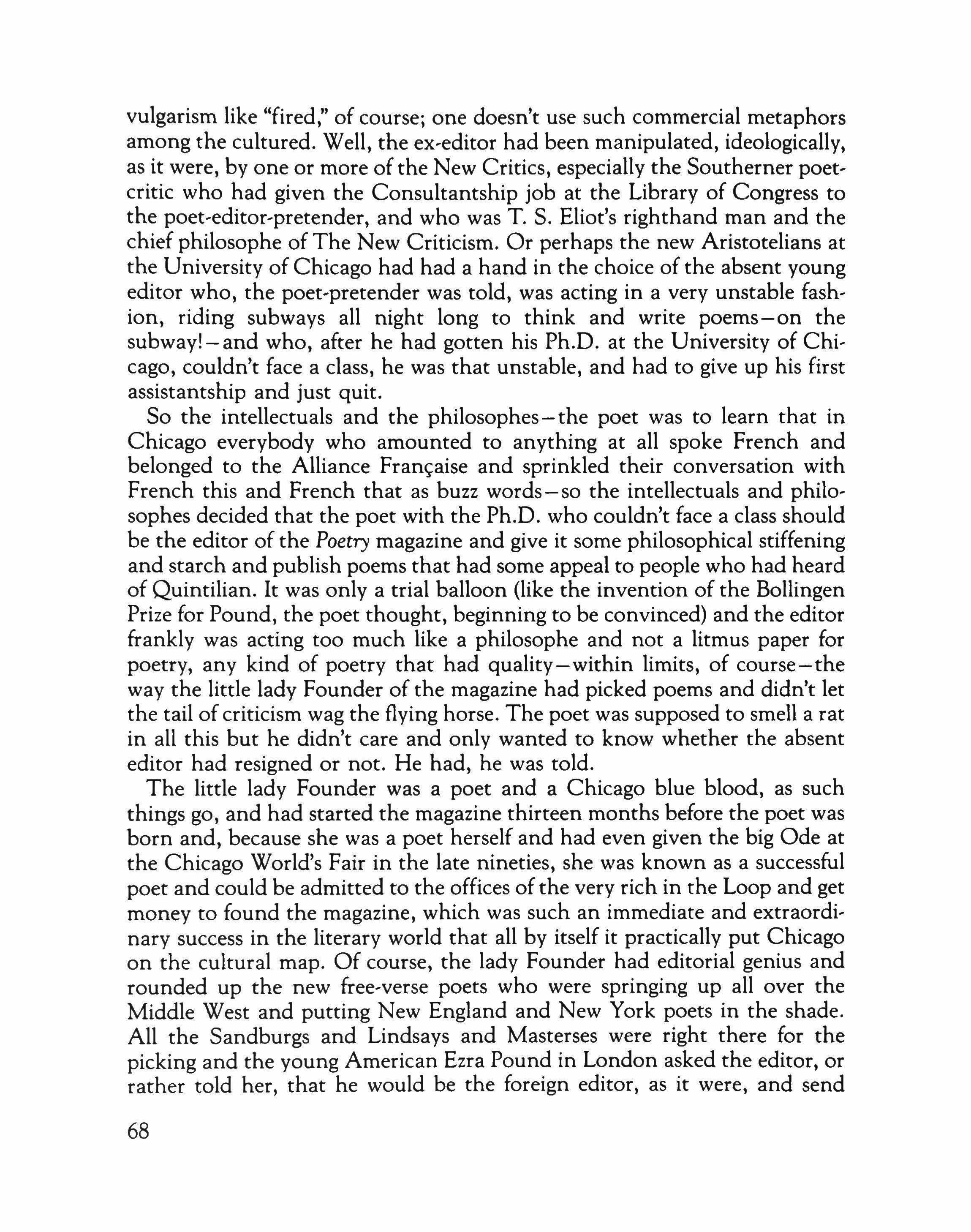
vulgarism like "fired," of course; one doesn't use such commercial metaphors among the cultured. Well, the ex-editor had been manipulated, ideologically, as it were, by one or more of the New Critics, especially the Southerner poet' critic who had given the Consultantship job at the Library of Congress to the poet-editor-pretender, and who was T. S. Eliot's righthand man and the chief philosophe of The New Criticism. Or perhaps the new Aristotelians at the University of Chicago had had a hand in the choice of the absent young editor who, the poet-pretender was told, was acting in a very unstable fashion, riding subways all night long to think and write poems-on the subway! - and who, after he had gotten his Ph.D. at the University of Chi, cago, couldn't face a class, he was that unstable, and had to give up his first assistantship and just quit.
So the intellectuals and the philosophes - the poet was to learn that in Chicago everybody who amounted to anything at all spoke French and belonged to the Alliance Francaise and sprinkled their conversation with French this and French that as buzz words - so the intellectuals and philo, sophes decided that the poet with the Ph.D. who couldn't face a class should be the editor of the Poetry magazine and give it some philosophical stiffening and starch and publish poems that had some appeal to people who had heard of Quintilian. It was only a trial balloon (like the invention of the Bollingen Prize for Pound, the poet thought, beginning to be convinced) and the editor frankly was acting too much like a philosophe and not a litmus paper for poetry, any kind of poetry that had quality-within limits, of course-the way the little lady Founder of the magazine had picked poems and didn't let the tail of criticism wag the flying horse. The poet was supposed to smell a rat in all this but he didn't care and only wanted to know whether the absent editor had resigned or not. He had, he was told.
The little lady Founder was a poet and a Chicago blue blood, as such things go, and had started the magazine thirteen months before the poet was born and, because she was a poet herself and had even given the big Ode at the Chicago World's Fair in the late nineties, she was known as a successful poet and could be admitted to the offices ofthe very rich in the Loop and get money to found the magazine, which was such an immediate and extraordinary success in the literary world that all by itself it practically put Chicago on the cultural map. Of course, the lady Founder had editorial genius and rounded up the new free-verse poets who were springing up all over the Middle West and putting New England and New York poets in the shade. All the Sandburgs and Lindsays and Masterses were right there for the picking and the young American Ezra Pound in London asked the editor, or rather told her, that he would be the foreign editor, as it were, and send
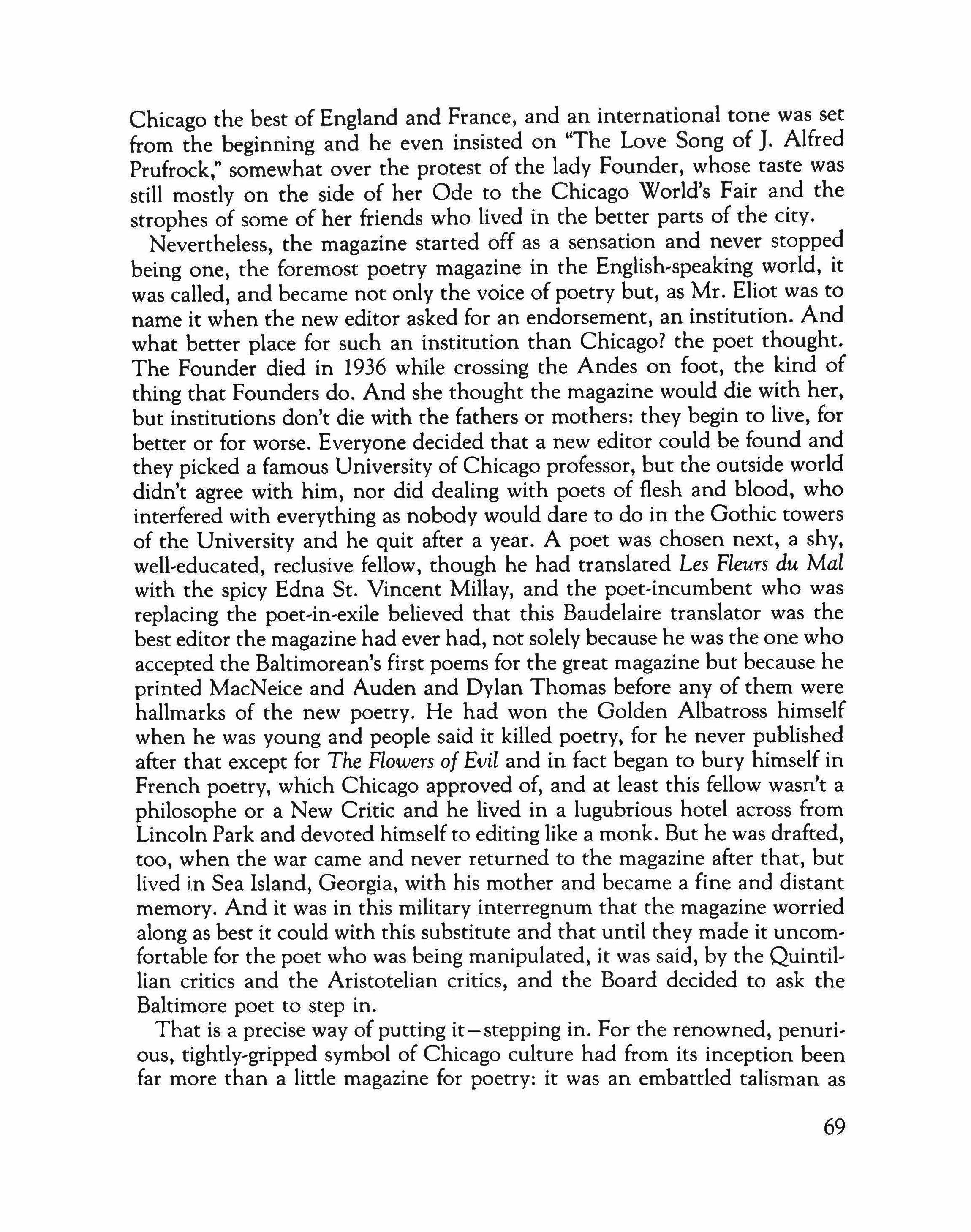
Chicago the best of England and France, and an international tone was set from the beginning and he even insisted on "The Love Song of J. Alfred Prufrock," somewhat over the protest of the lady Founder, whose taste was still mostly on the side of her Ode to the Chicago World's Fair and the strophes of some of her friends who lived in the better parts of the city.
Nevertheless, the magazine started off as a sensation and never stopped being one, the foremost poetry magazine in the English-speaking world, it was called, and became not only the voice of poetry but, as Mr. Eliot was to name it when the new editor asked for an endorsement, an institution. And what better place for such an institution than Chicago? the poet thought. The Founder died in 1936 while crossing the Andes on foot, the kind of thing that Founders do. And she thought the magazine would die with her, but institutions don't die with the fathers or mothers: they begin to live, for better or for worse. Everyone decided that a new editor could be found and they picked a famous University of Chicago professor, but the outside world didn't agree with him, nor did dealing with poets of flesh and blood, who interfered with everything as nobody would dare to do in the Gothic towers of the University and he quit after a year. A poet was chosen next, a shy, well-educated, reclusive fellow, though he had translated Les Fleurs du Mal with the spicy Edna St. Vincent Millay, and the poet-incumbent who was replacing the poet-in-exile believed that this Baudelaire translator was the best editor the magazine had ever had, not solely because he was the one who accepted the Baltimorean's first poems for the great magazine but because he printed MacNeice and Auden and Dylan Thomas before any of them were hallmarks of the new poetry. He had won the Golden Albatross himself when he was young and people said it killed poetry, for he never published after that except for The Flowers of Evil and in fact began to bury himself in French poetry, which Chicago approved of, and at least this fellow wasn't a philosophe or a New Critic and he lived in a lugubrious hotel across from Lincoln Park and devoted himself to editing like a monk. But he was drafted, too, when the war came and never returned to the magazine after that, but lived in Sea Island, Georgia, with his mother and became a fine and distant memory. And it was in this military interregnum that the magazine worried along as best it could with this substitute and that until they made it uncomfortable for the poet who was being manipulated, it was said, by the Quintillian critics and the Aristotelian critics, and the Board decided to ask the Baltimore poet to step in.
That is a precise way of putting it - stepping in. For the renowned, penurious, tightly-gripped symbol of Chicago culture had from its inception been far more than a little magazine for poetry: it was an embattled talisman as
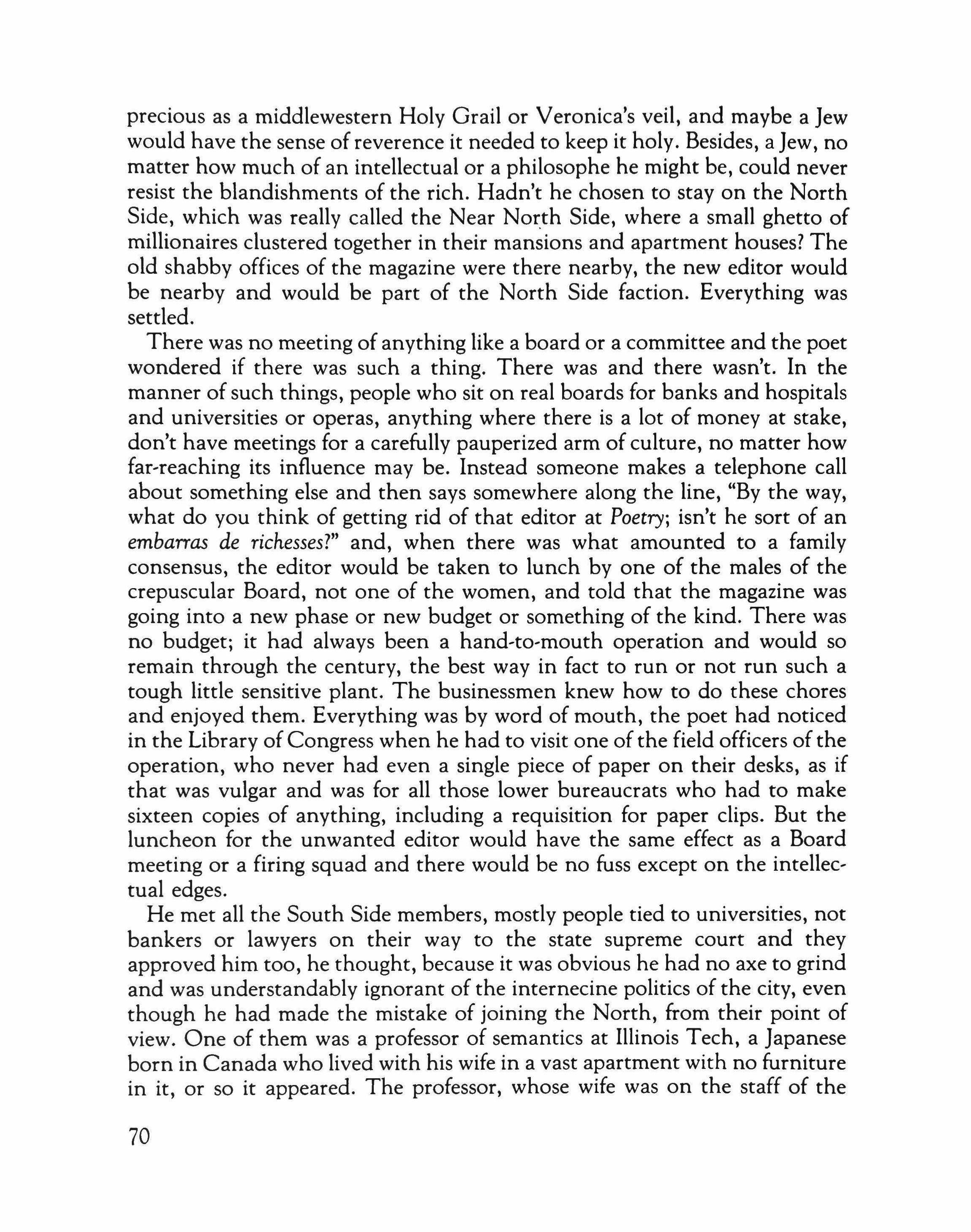
precious as a middlewestern Holy Grail or Veronica's veil, and maybe a Jew would have the sense of reverence it needed to keep it holy. Besides, a Jew, no matter how much of an intellectual or a philosophe he might be, could never resist the blandishments of the rich. Hadn't he chosen to stay on the North Side, which was really called the Near North Side, where a small ghetto of millionaires clustered together in their mansions and apartment houses? The old shabby offices of the magazine were there nearby, the new editor would be nearby and would be part of the North Side faction. Everything was settled.
There was no meeting of anything like a board or a committee and the poet wondered if there was such a thing. There was and there wasn't. In the manner of such things, people who sit on real boards for banks and hospitals and universities or operas, anything where there is a lot of money at stake, don't have meetings for a carefully pauperized arm of culture, no matter how far-reaching its influence may be. Instead someone makes a telephone call about something else and then says somewhere along the line, "By the way, what do you think of getting rid of that editor at Poetry; isn't he sort of an embarras de richesses?" and, when there was what amounted to a family consensus, the editor would be taken to lunch by one of the males of the crepuscular Board, not one of the women, and told that the magazine was going into a new phase or new budget or something of the kind. There was no budget; it had always been a hand-to-mouth operation and would so remain through the century, the best way in fact to run or not run such a tough little sensitive plant. The businessmen knew how to do these chores and enjoyed them. Everything was by word of mouth, the poet had noticed in the Library of Congress when he had to visit one of the field officers of the operation, who never had even a single piece of paper on their desks, as if that was vulgar and was for all those lower bureaucrats who had to make sixteen copies of anything, including a requisition for paper clips. But the luncheon for the unwanted editor would have the same effect as a Board meeting or a firing squad and there would be no fuss except on the intellectual edges.
He met all the South Side members, mostly people tied to universities, not bankers or lawyers on their way to the state supreme court and they approved him too, he thought, because it was obvious he had no axe to grind and was understandably ignorant of the internecine politics of the city, even though he had made the mistake of joining the North, from their point of view. One of them was a professor of semantics at Illinois Tech, a Japanese born in Canada who lived with his wife in a vast apartment with no furniture in it, or so it appeared. The professor, whose wife was on the staff of the
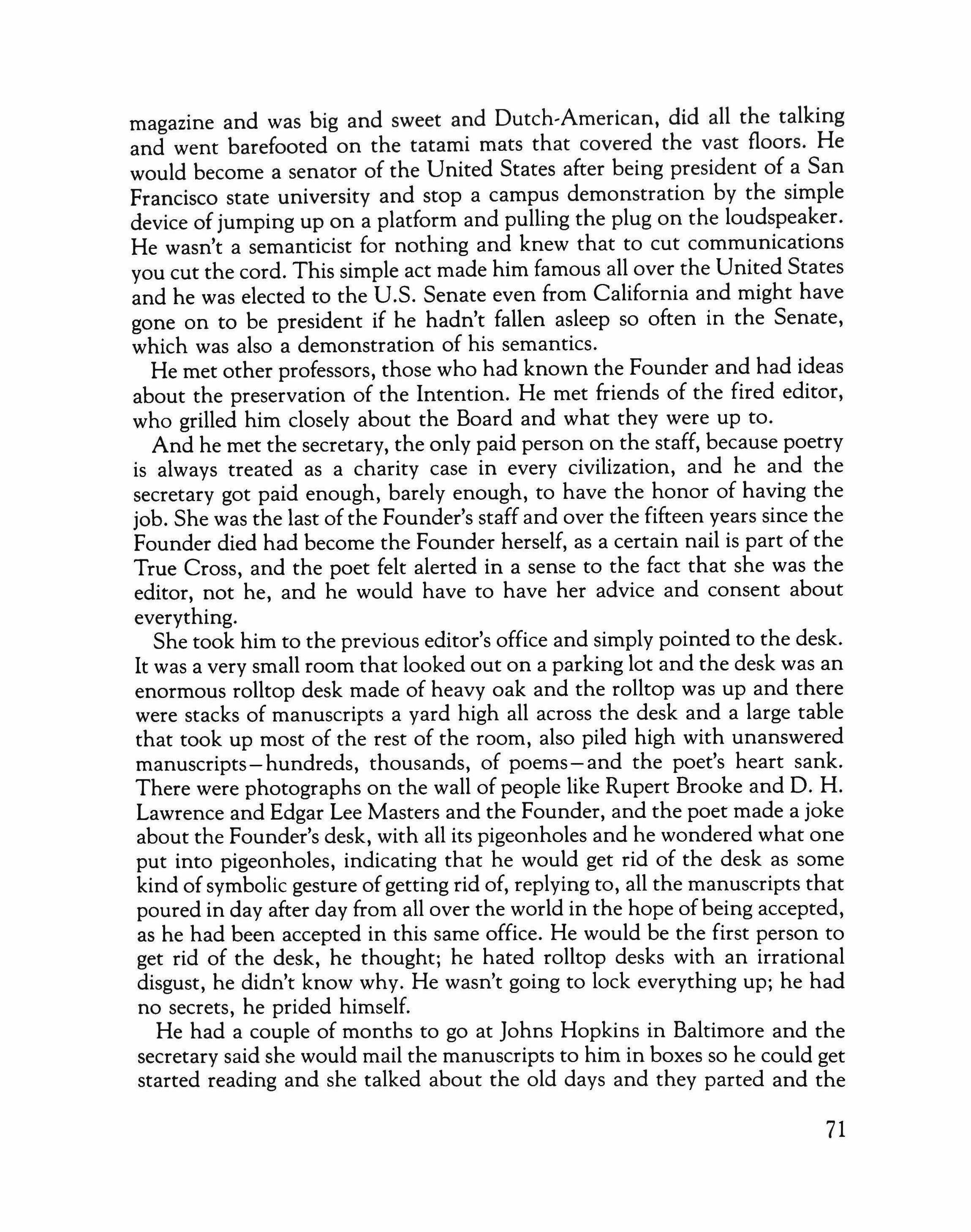
magazine and was big and sweet and Dutch-American, did all the talking and went barefooted on the tatami mats that covered the vast floors. He would become a senator of the United States after being president of a San Francisco state university and stop a campus demonstration by the simple device of jumping up on a platform and pulling the plug on the loudspeaker. He wasn't a semanticist for nothing and knew that to cut communications you cut the cord. This simple act made him famous all over the United States and he was elected to the U.S. Senate even from California and might have gone on to be president if he hadn't fallen asleep so often in the Senate, which was also a demonstration of his semantics.
He met other professors, those who had known the Founder and had ideas about the preservation of the Intention. He met friends of the fired editor, who grilled him closely about the Board and what they were up to.
And he met the secretary, the only paid person on the staff, because poetry is always treated as a charity case in every civilization, and he and the secretary got paid enough, barely enough, to have the honor of having the job. She was the last of the Founder's staff and over the fifteen years since the Founder died had become the Founder herself, as a certain nail is part of the True Cross, and the poet felt alerted in a sense to the fact that she was the editor, not he, and he would have to have her advice and consent about everything.
She took him to the previous editor's office and simply pointed to the desk. It was a very small room that looked out on a parking lot and the desk was an enormous rolltop desk made of heavy oak and the rolltop was up and there were stacks of manuscripts a yard high all across the desk and a large table that took up most of the rest of the room, also piled high with unanswered manuscripts-hundreds, thousands, of poems-and the poet's heart sank. There were photographs on the wall of people like Rupert Brooke and D. H. Lawrence and Edgar Lee Masters and the Founder, and the poet made a joke about the Founder's desk, with all its pigeonholes and he wondered what one put into pigeonholes, indicating that he would get rid of the desk as some kind of symbolic gesture ofgetting rid of, replying to, all the manuscripts that poured in day after day from all over the world in the hope ofbeing accepted, as he had been accepted in this same office. He would be the first person to get rid of the desk, he thought; he hated rolltop desks with an irrational disgust, he didn't know why. He wasn't going to lock everything up; he had no secrets, he prided himself.
He had a couple of months to go at Johns Hopkins in Baltimore and the secretary said she would mail the manuscripts to him in boxes so he could get started reading and she talked about the old days and they parted and the

poet knew he could not work with her because she was living in the past and had seen too many editors come and go and none of them could ever measure up to the Founder.
Like his father when he had come to Chicago to find an apartment for his young family, he found an apartment, with the help of his new rich friends who knew everybody who owned the right kind ofplaces to live. It was a new apartment "complex" not within walking distance of his office but it was good enough, even though it was across the street from a sausage factory, but then the whole city still was redolent with the smell of meat, which was what Chicago was all about and when the wind blew from the South where the Southern Faction lived, the stench of the abattoirs hung over the North Side too.
He fired the secretary on the Fourth ofJuly, when nobody works. He asked her to come to the office and he told her, who had been in that office when he was in diapers, that he had to let her go. He could never remember how he told her, only that she said nothing and got up and left the building. He sat in his chair for hours and then went home. He had never fired anyone and the idea was somehow vile to him. He had fairly strong premonitions about what would happen, the attempts to fire him by the South Side and some ofthe North, the outrage, the tears, a kind of horror at the desecration. Nor would he ever regret the firing, though he was cowardly enough to let people believe that it was because of his wife, who had been his own editor in the war years and who now, because of her success with the poet's writing and his books, had been made Managing Editor and had her name on the masthead of the little magazine. But it became immediately apparent that she was no businesswoman and was having trouble with the printer and the advertisers, the tiny few that there were, and she had already fired a man, a poet at that, who was trying to get subscriptions and advertising in New York. Firing was in the air and it was natural for everybody to think that she was behind the firing of the original secretary, the last of the Founder's line. And it was not long before the poet's wife would herself be fired out of the general discontent of the few Board Members who took a hand in watching the pitiful accounts of the magazine, which did, come hell or high water, actually pay its contributing poets fifty cents a line for poetry and it was practically the only poetry magazine in the world that did because that was part of the Founder's purpose, to try to de-pauperize poets, if only with token payment, and somebody had to look over the shoulder of the Managing Editor and it was in the long run the businessmen, who had inherited the original responsibility of keeping the magazine alive, who hinted that the poet's wife was in the wrong slot, so she quit peaceably, being four months

pregnant, and there was no outcry from anybody, including the poet, who was in the mood for a clean sweep.
It wasn't that the secretary had "done anything," the poet said to himself, it was that she had done too much in gradually assuming critical responsibility for the contents of the magazine over the years and in the comings and goings of editors and especially when there was no editor at all. In this way she had become a pawn for those Board Members, or rather some of their wives, who had certain tastes about poets and poetry and would try to influence the acceptances, sometimes for their friends or themselves.
The precedent for this was the Founder herself, who not only printed the then-scandalous poems of Sandburg and Lindsay and Masters and Eliot and Pound, but also the poems of what the poet called the "Lake Forest Ladies," the friends of the Founder, the people in the social register of Chicago who belonged to the age of Edward VII, prosodically speaking, and believed that the Founder's Ode for the Columbian Exposition was a masterpiece. This eclecticism naturally resulted in esthetic crises, as when the annual prizes were chosen and one of the Ladies of Lake Forest won a first prize, while Eliot's "The Love Song ofJ. Alfred Prufrock" received an honorable mention. After all, a magazine that printed Sandburg's "Chicago" to the praises and curses of the newspapers could afford to vacillate on a poem like "Prufrock," which nobody claimed to understand but which radiated some kind of genius, and traditionalism was an ace in the hole during these esthetic crises. The secretary was only following the lead of her teacher, except that she had no portfolio and was not intended to be editor in the first place or any place. There was even a personal following she had picked up, her friends, not blue bloods but just hangers-on, such as always collect around a cultural side, board. The poet believed he had not imagined any of this and that he had acted just in time. He had fired two women - he didn't fight to keep his wife on the masthead-and he felt he would now have a free hand to do what he had been brought there for. He would have to hire a secretary and he looked forward to the assignment, while one of the Board Members, who owned a huge textbook publishing company, chose a bright young Irishman to be the Managing Editor, if everybody approved. Nobody objected.
The Japanese Board Member and his wife both resigned in outrage at the firing ofthe secretary; several others who were her friends resigned. He heard remarks about the style of his action, Chicago-style one of them said, like a butcher or an Al Capone, and the poet was not even stung and could never tell anyone what he felt, a deep shame as if he had killed someone in self, defense. Almost immediately, she was made editor of a journal of dental technology, a fine-paying job he heard, but he knew what a comedown it

must be, from poetry to teeth. Her friends all disappeared from the office, volunteers who sorted and filed and typed letters and even read manuscripts. In a fit of ritualistic cleansing of his guilt, he turned housekeeper and librarian; he scanned the groaning shelves of books, already rare, and the Poetry magazines that went all the way back to the precious Volume One Number One of October 1912 that had burst upon the literary world like a star shell. They were all dusty and dry and crumpled and the librarian suddenly decided to have boxes made to get the thousands of copies filed safely away in snug little cartons, black cartons he decided, and he calculated the number ofblack boxes he would need and ordered them from a paper company at an expense which the magazine couldn't afford. It would take months to sort and pack the magazines but he was pleased when it was done and the boxes labeled and lined up on the shelves, though a visiting poet once came in and stood still and said he thought he was in a shoe store. He tried to give away the Founder's rolltop desk but nobody wanted such a monstrosity until some Chicago Historical Society people said they would store it in their basement. There were three rooms the magazine rented and where it had been for decades on a side street offMichigan Avenue, where the rich shops were, and the magazine faced a lamp factory named after Rembrandt, which discharged red sawdust into the air every ten minutes right at the poetry offices so that the big front office had a fine coating of redwood dust and it was best not to open the windows. Behind that were two small-to-tiny rooms for the editors, and the poet took the furthest one, which the previous editors had used. He looked out on a parking lot, but kept his own door to the corridor half open to see the passersby who came from and went to what was called The Chicago Models Club. The models, if that's what they were, made him feel lickerish with their high heels and peroxide hair and loud dresses, as they came and went to be posed and photographed for nightclubs that hired them, and he wrote a poem about them. The photographer would sometimes bring the poet huge, half-dead bouquets from the nightclubs and the poet would distribute them around the offices with sly remarks and giggles from the volunteers at work. He longed for these women and their sleazy lives and felt womanless in his cubicle, in this life, as if he were moving in a circle of untouchables among the too-rich or the too-educated girls who came from the best or the most expensive schools to work a while on the magazine on their work-study programs and he was too innocent to know that going to bed with them was part of their program. One of these girls from Bennington reproached him years later when they were talking about Poetry and her job that spring and said, "Why didn't you seduce me?" and he had no answer. He worked his way through the mountain of manuscripts over the months
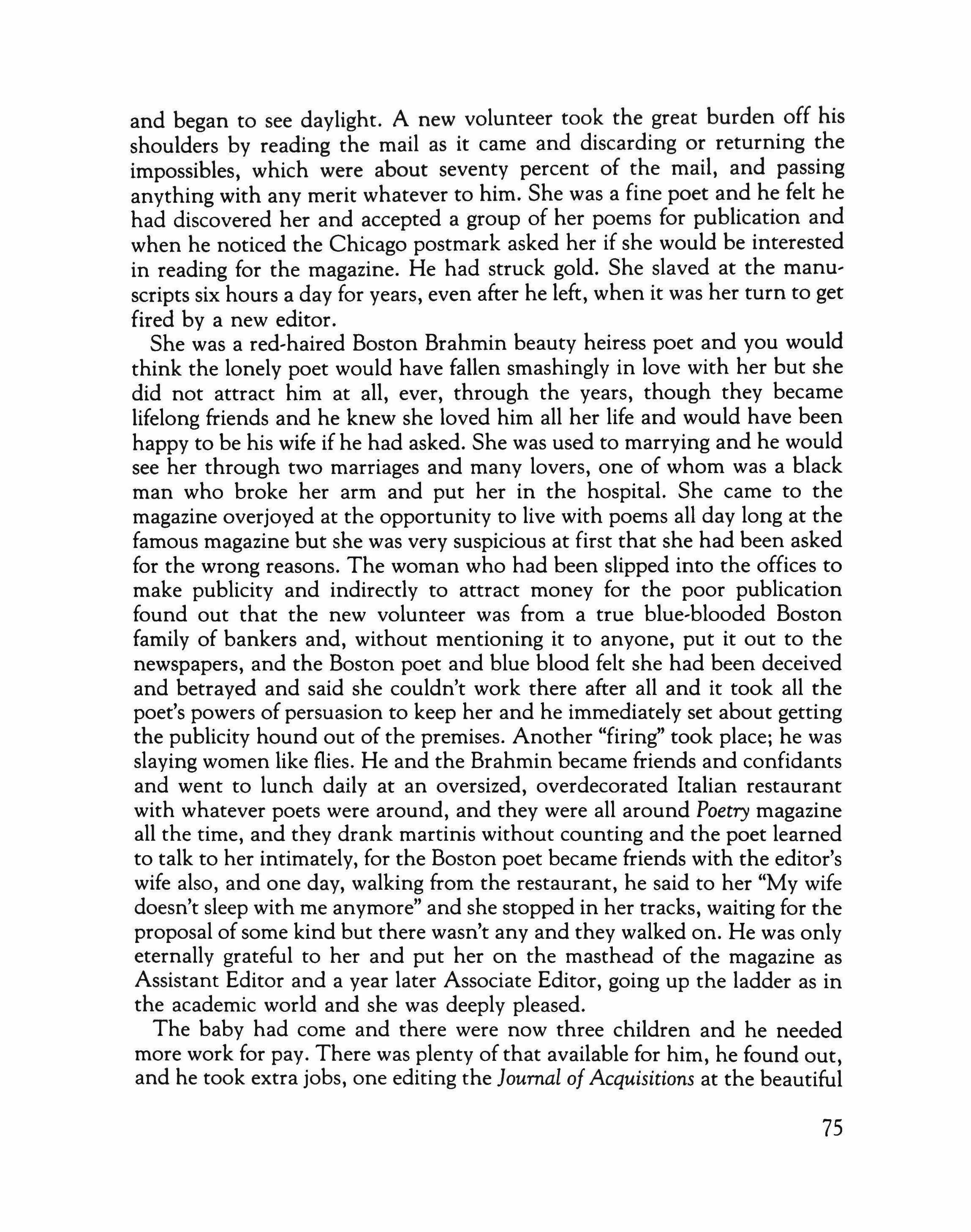
and began to see daylight. A new volunteer took the great burden off his shoulders by reading the mail as it came and discarding or returning the impossibles, which were about seventy percent of the mail, and passing anything with any merit whatever to him. She was a fine poet and he felt he had discovered her and accepted a group of her poems for publication and when he noticed the Chicago postmark asked her if she would be interested in reading for the magazine. He had struck gold. She slaved at the manu, scripts six hours a day for years, even after he left, when it was her turn to get fired by a new editor.
She was a red,haired Boston Brahmin beauty heiress poet and you would think the lonely poet would have fallen smashingly in love with her but she did not attract him at all, ever, through the years, though they became lifelong friends and he knew she loved him all her life and would have been happy to be his wife if he had asked. She was used to marrying and he would see her through two marriages and many lovers, one of whom was a black man who broke her arm and put her in the hospital. She came to the magazine overjoyed at the opportunity to live with poems all day long at the famous magazine but she was very suspicious at first that she had been asked for the wrong reasons. The woman who had been slipped into the offices to make publicity and indirectly to attract money for the poor publication found out that the new volunteer was from a true blue-blooded Boston family of bankers and, without mentioning it to anyone, put it out to the newspapers, and the Boston poet and blue blood felt she had been deceived and betrayed and said she couldn't work there after all and it took all the poet's powers of persuasion to keep her and he immediately set about getting the publicity hound out of the premises. Another "firing" took place; he was slaying women like flies. He and the Brahmin became friends and confidants and went to lunch daily at an oversized, overdecorated Italian restaurant with whatever poets were around, and they were all around Poetry magazine all the time, and they drank martinis without counting and the poet learned to talk to her intimately, for the Boston poet became friends with the editor's wife also, and one day, walking from the restaurant, he said to her "My wife doesn't sleep with me anymore" and she stopped in her tracks, waiting for the proposal of some kind but there wasn't any and they walked on. He was only eternally grateful to her and put her on the masthead of the magazine as Assistant Editor and a year later Associate Editor, going up the ladder as in the academic world and she was deeply pleased.
The baby had come and there were now three children and he needed more work for pay. There was plenty of that available for him, he found out, and he took extra jobs, one editing the Journal ofAcquisitions at the beautiful
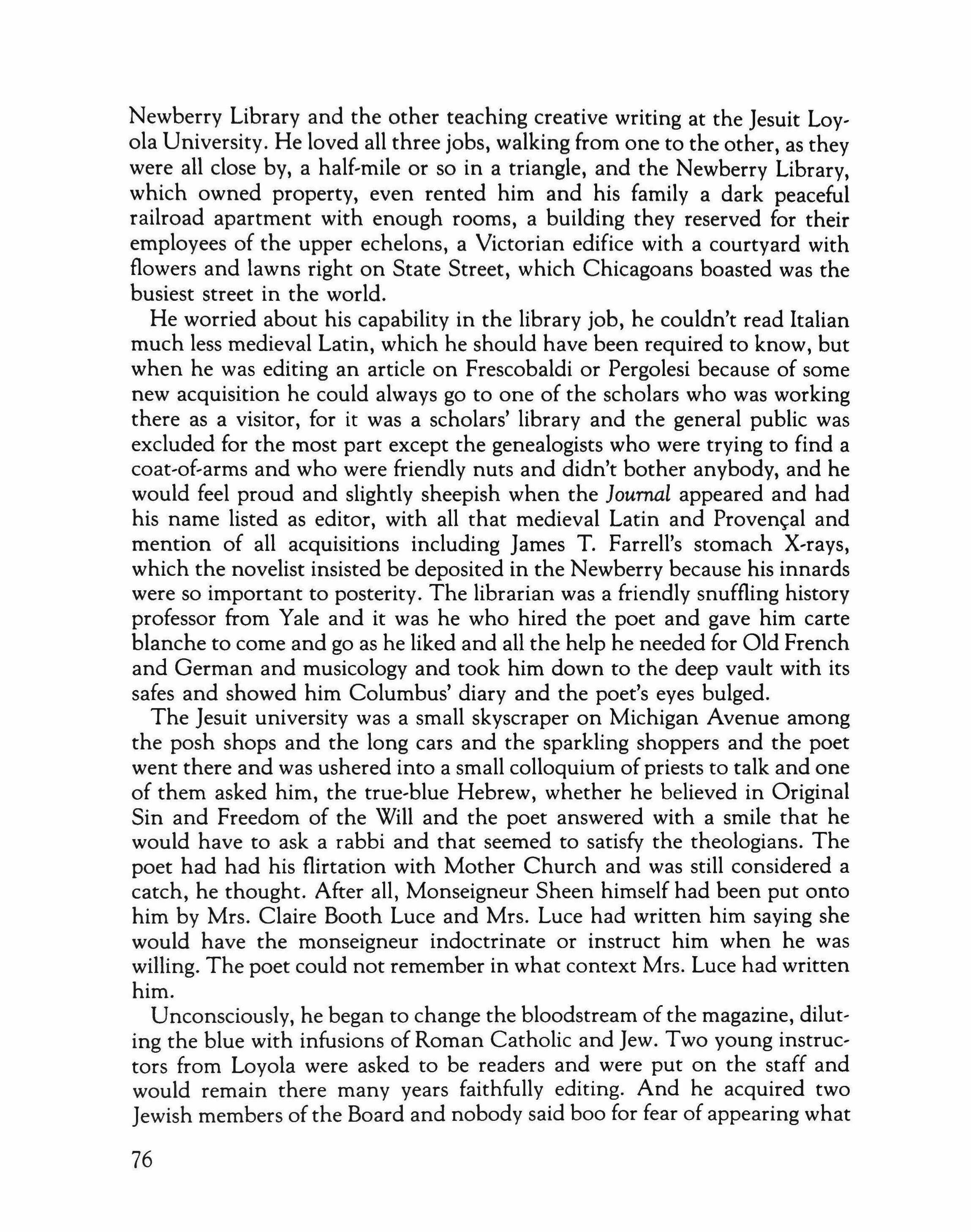
Newberry Library and the other teaching creative writing at the Jesuit Loy, ola University. He loved all three jobs, walking from one to the other, as they were all close by, a half-mile or 50 in a triangle, and the Newberry Library, which owned property, even rented him and his family a dark peaceful railroad apartment with enough rooms, a building they reserved for their employees of the upper echelons, a Victorian edifice with a courtyard with flowers and lawns right on State Street, which Chicagoans boasted was the busiest street in the world.
He worried about his capability in the library job, he couldn't read Italian much less medieval Latin, which he should have been required to know, but when he was editing an article on Frescobaldi or Pergolesi because of some new acquisition he could always go to one of the scholars who was working there as a visitor, for it was a scholars' library and the general public was excluded for the most part except the genealogists who were trying to find a coat-of-arms and who were friendly nuts and didn't bother anybody, and he would feel proud and slightly sheepish when the Journal appeared and had his name listed as editor, with all that medieval Latin and Provencal and mention of all acquisitions including James T. Farrell's stomach X,rays, which the novelist insisted be deposited in the Newberry because his innards were 50 important to posterity. The librarian was a friendly snuffling history professor from Yale and it was he who hired the poet and gave him carte blanche to come and go as he liked and all the help he needed for Old French and German and musicology and took him down to the deep vault with its safes and showed him Columbus' diary and the poet's eyes bulged.
The Jesuit university was a small skyscraper on Michigan Avenue among the posh shops and the long cars and the sparkling shoppers and the poet went there and was ushered into a small colloquium ofpriests to talk and one of them asked him, the true-blue Hebrew, whether he believed in Original Sin and Freedom of the Will and the poet answered with a smile that he would have to ask a rabbi and that seemed to satisfy the theologians. The poet had had his flirtation with Mother Church and was still considered a catch, he thought. After all, Monseigneur Sheen himself had been put onto him by Mrs. Claire Booth Luce and Mrs. Luce had written him saying she would have the monseigneur indoctrinate or instruct him when he was willing. The poet could not remember in what context Mrs. Luce had written him.
Unconsciously, he began to change the bloodstream of the magazine, diluting the blue with infusions of Roman Catholic and Jew. Two young instructors from Loyola were asked to be readers and were put on the staff and would remain there many years faithfully editing. And he acquired two Jewish members ofthe Board and nobody said boo for fear of appearing what

they had always been, a clan of the elite of the city fathers. One of the Jews was a young prominent lawyer, who impressed the Board and who in fact had been recommended by one of them. The other was a firebrand financier who had rediscovered Mies van der Rohe living in obscurity in Chicago, where the skyscraper had been born, and engaged him to build glass'and, steel apartment high-rises on the lakefront and was financing whole develop' ments, whole cities in other parts of the country, and was flying back and forth to New York every other day until on one of those night commuter flights his plane went down in the East River with all hands aboard and him with it. None ofthis was very world-shaking to the little magazine, except for the death of the young financier, and the publication began to right itself and the editor was complimented on the editing by poets and readers and he asked a modern French scholar to advise him about European poets and asked a young California critic, a Pound disciple, to be his criticism adviser. It was partly to assuage his feelings of uneasiness about the repercussions of the Bollingen Prize, as he feared that he might be lumped with the philistines because of his vote against Pound, and he was tacking in the direction of the Poundians in order to get as far away from the anti-modernists as possible. The smoke of battle settled after the resignations and the introduction of the new members and no mention was ever made of the Late Unpleasant, ness, as the Board would refer to late unpleasantnesses in their somewhat quaint English, and the poet was learning that in their circle one did not speak of the past either as precedent or as recrimination. The past was for family members or equals; if there was something serious involved, some past event that impinged on the present, then one would speak to the family lawyer or lawyers, and every family had lawyers in the family itself as a matter of self-defense, otherwise one would refer to the past only as honor, able recollection or blessed memory, as one spoke of the Founder. Sometimes the poet thought that his firing of the secretary and the South Side resigna' tions hadn't even occurred, the obliteration was so complete. So this is what it is to be civilized, he thought, for he had never encountered ruling-class behavior at close range before and was astonished at the equanimity of the players and what looked like their refusal to have their happiness interfered with. He was right but there was more to it than that, he would find out. Up to now he had been acquiring the impression that the Fathers, as he was coming to think of them, merely tolerated the magazine to please their wives and the social register and as far as he was concerned it was all velvet. But under the velvet, under most velvet, there lies a claw. He wasn't actually about to be clawed but he was about to feel the hand of the Stone Guest give his own hand a squeeze as a reminder of who he was.
He had become friends with a youngish German scholar and editor who
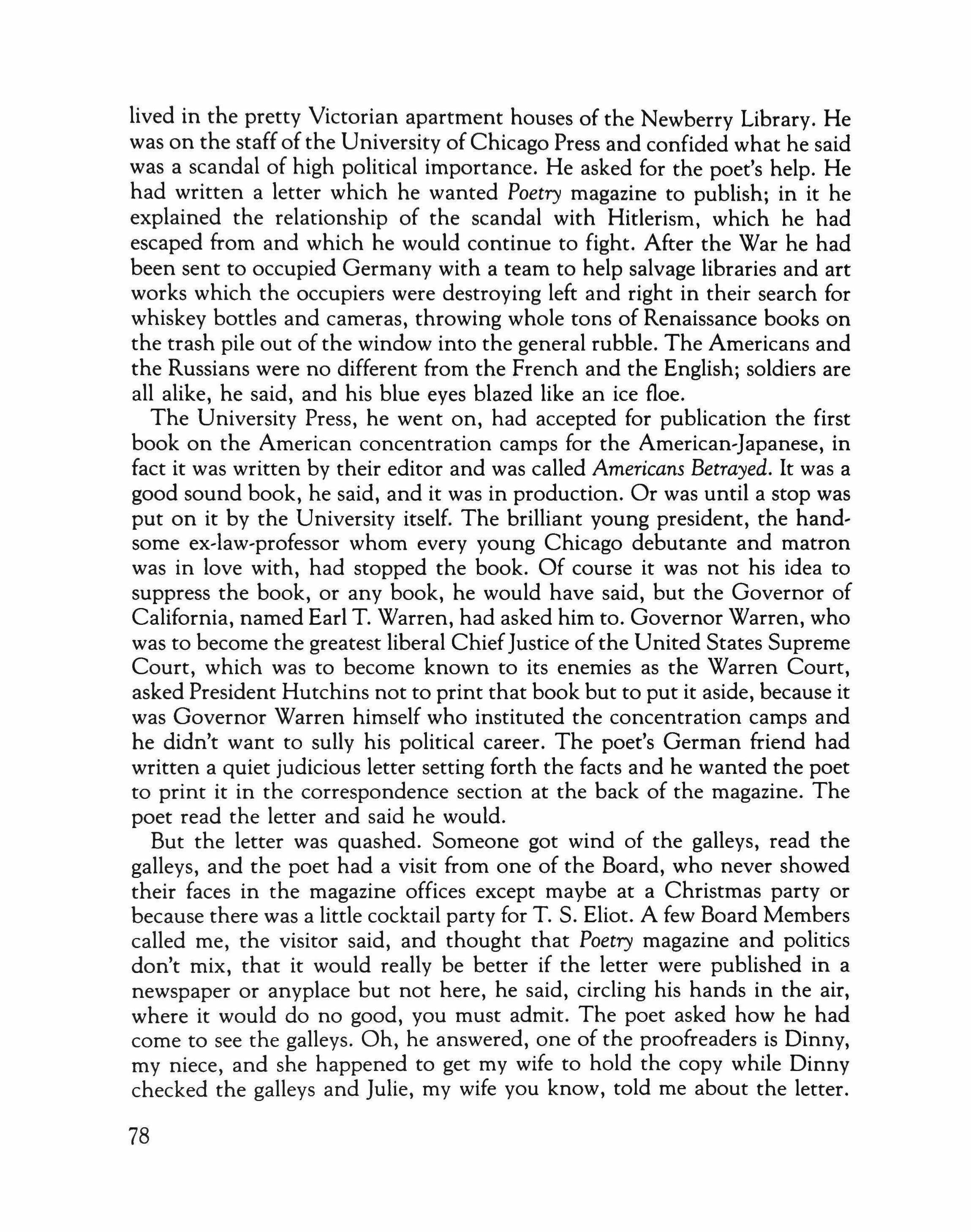
lived in the pretty Victorian apartment houses of the Newberry Library. He was on the staffof the University of Chicago Press and confided what he said was a scandal of high political importance. He asked for the poet's help. He had written a letter which he wanted Poetry magazine to publish; in it he explained the relationship of the scandal with Hitlerism, which he had escaped from and which he would continue to fight. After the War he had been sent to occupied Germany with a team to help salvage libraries and art works which the occupiers were destroying left and right in their search for whiskey bottles and cameras, throwing whole tons of Renaissance books on the trash pile out of the window into the general rubble. The Americans and the Russians were no different from the French and the English; soldiers are all alike, he said, and his blue eyes blazed like an ice floe.
The University Press, he went on, had accepted for publication the first book on the American concentration camps for the American-japanese, in fact it was written by their editor and was called Americans Betrayed. It was a good sound book, he said, and it was in production. Or was until a stop was put on it by the University itself. The brilliant young president, the hand, some ex-law-professor whom every young Chicago debutante and matron was in love with, had stopped the book. Of course it was not his idea to suppress the book, or any book, he would have said, but the Governor of California, named Earl T. Warren, had asked him to. Governor Warren, who was to become the greatest liberal Chiefjustice of the United States Supreme Court, which was to become known to its enemies as the Warren Court, asked President Hutchins not to print that book but to put it aside, because it was Governor Warren himself who instituted the concentration camps and he didn't want to sully his political career. The poet's German friend had written a quiet judicious letter setting forth the facts and he wanted the poet to print it in the correspondence section at the back of the magazine. The poet read the letter and said he would.
But the letter was quashed. Someone got wind of the galleys, read the galleys, and the poet had a visit from one of the Board, who never showed their faces in the magazine offices except maybe at a Christmas party or because there was a little cocktail party for T. S. Eliot. A few Board Members called me, the visitor said, and thought that Poetry magazine and politics don't mix, that it would really be better if the letter were published in a newspaper or anyplace but not here, he said, circling his hands in the air, where it would do no good, you must admit. The poet asked how he had come to see the galleys. Oh, he answered, one of the proofreaders is Dinny, my niece, and she happened to get my wife to hold the copy while Dinny checked the galleys and julie, my wife you know, told me about the letter.

Well, of course, I sounded out a few Members who are on the Board of the University, also here and the Library, etc., and we thought we would give you our view.
The poet told his new young staff about the incident, waxing indignant about the U.S. concentration camps and the cynical politicians and got off the track and started talking about Japanese atrocities in the war and the machine-gunning and bayonetting of amputees in the hospitals and the rape of Nanking, but got back on again and the staff, to his surprise, except for the redheaded Boston Brahmin, told him that that letter would get nowhere in Poetry but would be buried in the stacks and nobody would ever even see it and that the German for all his good intentions didn't understand that poetry in America isn't what it is in Europe, as he well knew, and that everybody should try to do something about the University of Chicago Press but not here at Poetry.
The poet sculled, then backtracked and told what he had decided to the German friend, who glowered and then fell silent. He told the poet that the author of the book and chief editor at the Press had already resigned and gone to a Southern university to head their press and that a poet had taken his place and that the Governor ofCalifornia and the handsome President of the University of Chicago had smoothed everything over. The poet had smoothed everything over too; he wasn't ready to tilt against the Establish, ment so soon after his last defeat.
There was peace at his own little establishment or institution as he went from job to job to job through the days and cared for the new baby and attended the parties with his wife that were given by the aristocrats on Astor Street and State Parkway or at French restaurants where nobody dared speak English unless they wanted a live fly in their dessert. They visited the Boston Brahmin in her Mies van der Rohe house in the suburbs and talked quietly and were not served anything with alcohol because her husband was a confirmed alcoholic and there was always the danger that he would take a first drink and then disappear for days, weeks or forever. Life and the magazine had struck smooth sailing for the poet, on the other hand, and he found time to write a series of poems about Adam and Eve, inspired by pamphlets and a book and recollections of talks about Wilhelm Reich with his old friend the Reichean psychiatrist. Reich had pointed out something so obvious in the opening lines of Genesis that no one had ever pulled aside the symbolism, or jerked it aside in quite that way, namely that it was a description of puberty in the two sexes and the horror of the knowledge of union. The Hebrew myth was so bald that the believers would always take it for something else, about devils and angels and paradise and stolen ribs. He was
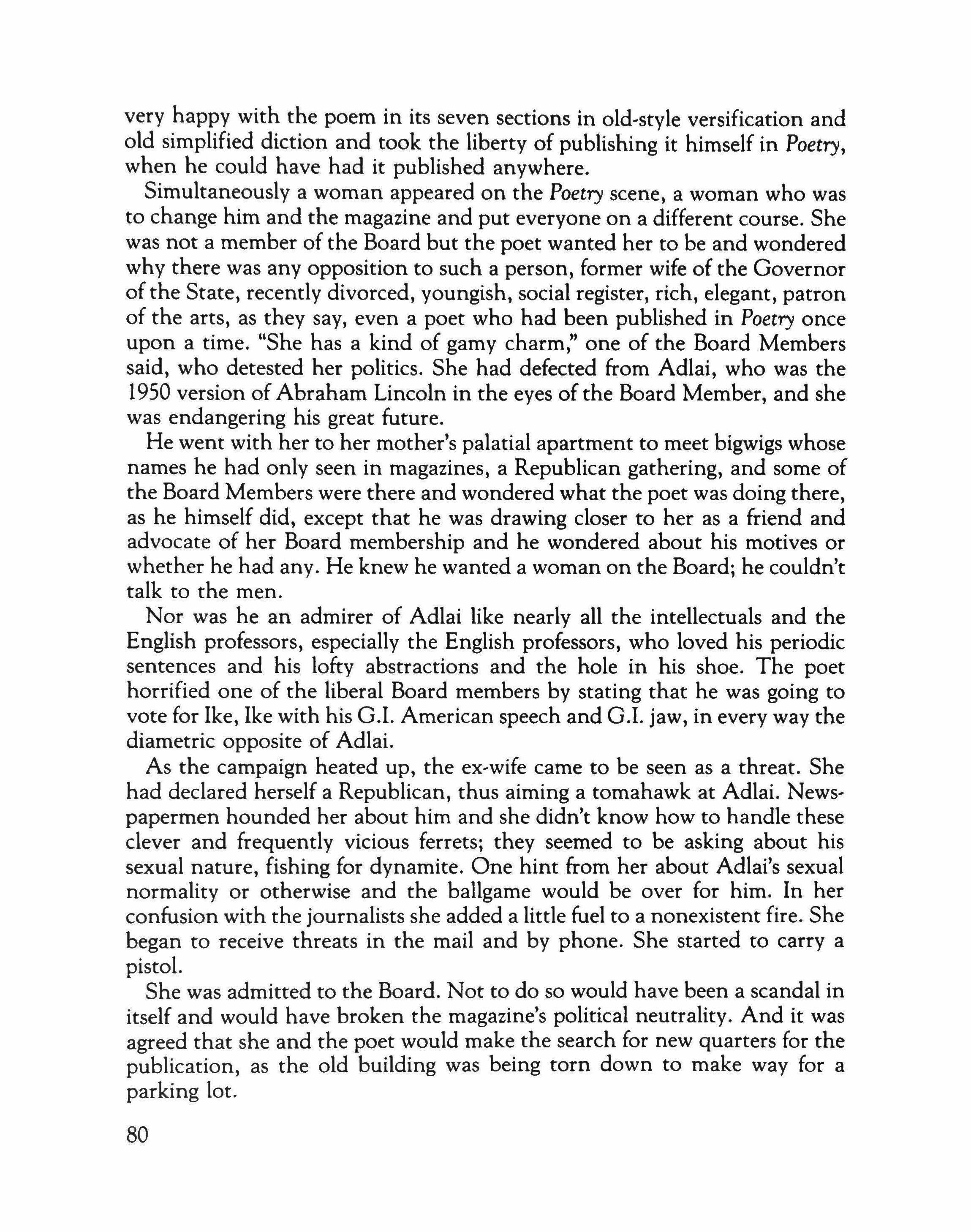
very happy with the poem in its seven sections in old-style versification and old simplified diction and took the liberty of publishing it himself in Poetry, when he could have had it published anywhere.
Simultaneously a woman appeared on the Poetry scene, a woman who was to change him and the magazine and put everyone on a different course. She was not a member of the Board but the poet wanted her to be and wondered why there was any opposition to such a person, former wife of the Oovernor of the State, recently divorced, youngish, social register, rich, elegant, patron of the arts, as they say, even a poet who had been published in Poetry once upon a time. "She has a kind of gamy charm," one of the Board Members said, who detested her politics. She had defected from Adlai, who was the 1950 version of Abraham Lincoln in the eyes of the Board Member, and she was endangering his great future.
He went with her to her mother's palatial apartment to meet bigwigs whose names he had only seen in magazines, a Republican gathering, and some of the Board Members were there and wondered what the poet was doing there, as he himself did, except that he was drawing closer to her as a friend and advocate of her Board membership and he wondered about his motives or whether he had any. He knew he wanted a woman on the Board; he couldn't talk to the men.
Nor was he an admirer of Adlai like nearly all the intellectuals and the English professors, especially the English professors, who loved his periodic sentences and his lofty abstractions and the hole in his shoe. The poet horrified one of the liberal Board members by stating that he was going to vote for Ike, Ike with his O.I. American speech and O.I. jaw, in every way the diametric opposite of Adlai.
As the campaign heated up, the ex-wife came to be seen as a threat. She had declared herself a Republican, thus aiming a tomahawk at Adlai. Newspapermen hounded her about him and she didn't know how to handle these clever and frequently vicious ferrets; they seemed to be asking about his sexual nature, fishing for dynamite. One hint from her about Adlai's sexual normality or otherwise and the ballgame would be over for him. In her confusion with the journalists she added a little fuel to a nonexistent fire. She began to receive threats in the mail and by phone. She started to carry a pistol.
She was admitted to the Board. Not to do so would have been a scandal in itself and would have broken the magazine's political neutrality. And it was agreed that she and the poet would make the search for new quarters for the publication, as the old building was being torn down to make way for a parking lot.
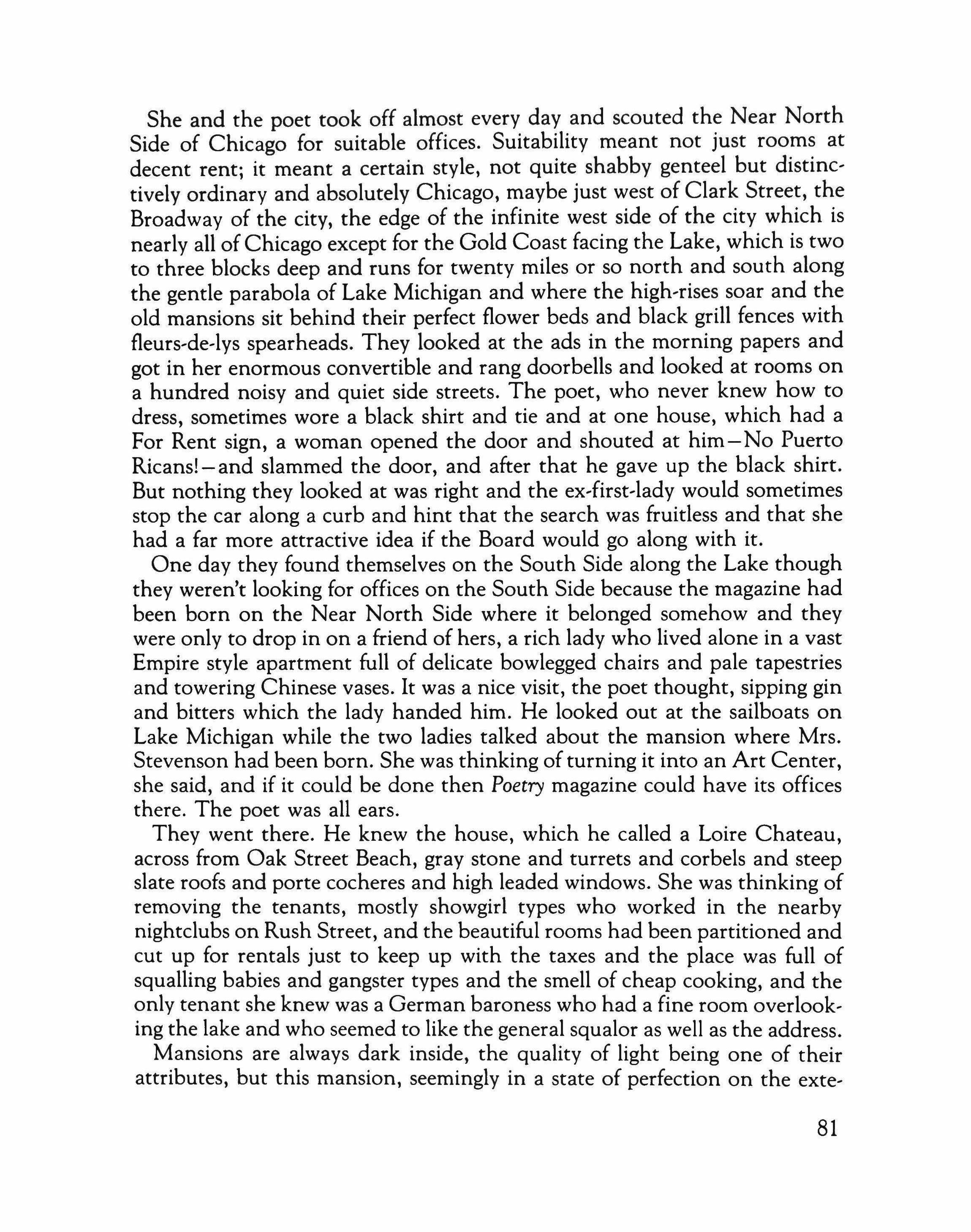
She and the poet took off almost every day and scouted the Near North Side of Chicago for suitable offices. Suitability meant not just rooms at decent rent; it meant a certain style, not quite shabby genteel but distinctively ordinary and absolutely Chicago, maybe just west of Clark Street, the Broadway of the city, the edge of the infinite west side of the city which is nearly all of Chicago except for the Gold Coast facing the Lake, which is two to three blocks deep and runs for twenty miles or so north and south along the gentle parabola of Lake Michigan and where the high-rises soar and the old mansions sit behind their perfect flower beds and black grill fences with fleurs-de-lys spearheads. They looked at the ads in the morning papers and got in her enormous convertible and rang doorbells and looked at rooms on a hundred noisy and quiet side streets. The poet, who never knew how to dress, sometimes wore a black shirt and tie and at one house, which had a For Rent sign, a woman opened the door and shouted at him - No Puerto Ricans!-and slammed the door, and after that he gave up the black shirt. But nothing they looked at was right and the ex-first-lady would sometimes stop the car along a curb and hint that the search was fruitless and that she had a far more attractive idea if the Board would go along with it.
One day they found themselves on the South Side along the Lake though they weren't looking for offices on the South Side because the magazine had been born on the Near North Side where it belonged somehow and they were only to drop in on a friend of hers, a rich lady who lived alone in a vast Empire style apartment full of delicate bowlegged chairs and pale tapestries and towering Chinese vases. It was a nice visit, the poet thought, sipping gin and bitters which the lady handed him. He looked out at the sailboats on Lake Michigan while the two ladies talked about the mansion where Mrs. Stevenson had been born. She was thinking ofturning it into an Art Center, she said, and if it could be done then Poetry magazine could have its offices there. The poet was all ears.
They went there. He knew the house, which he called a Loire Chateau, across from Oak Street Beach, gray stone and turrets and corbels and steep slate roofs and porte cocheres and high leaded windows. She was thinking of removing the tenants, mostly showgirl types who worked in the nearby nightclubs on Rush Street, and the beautiful rooms had been partitioned and cut up for rentals just to keep up with the taxes and the place was full of squalling babies and gangster types and the smell of cheap cooking, and the only tenant she knew was a German baroness who had a fine room overlook, ing the lake and who seemed to like the general squalor as well as the address.
Mansions are always dark inside, the quality of light being one of their attributes, but this mansion, seemingly in a state of perfection on the exte-
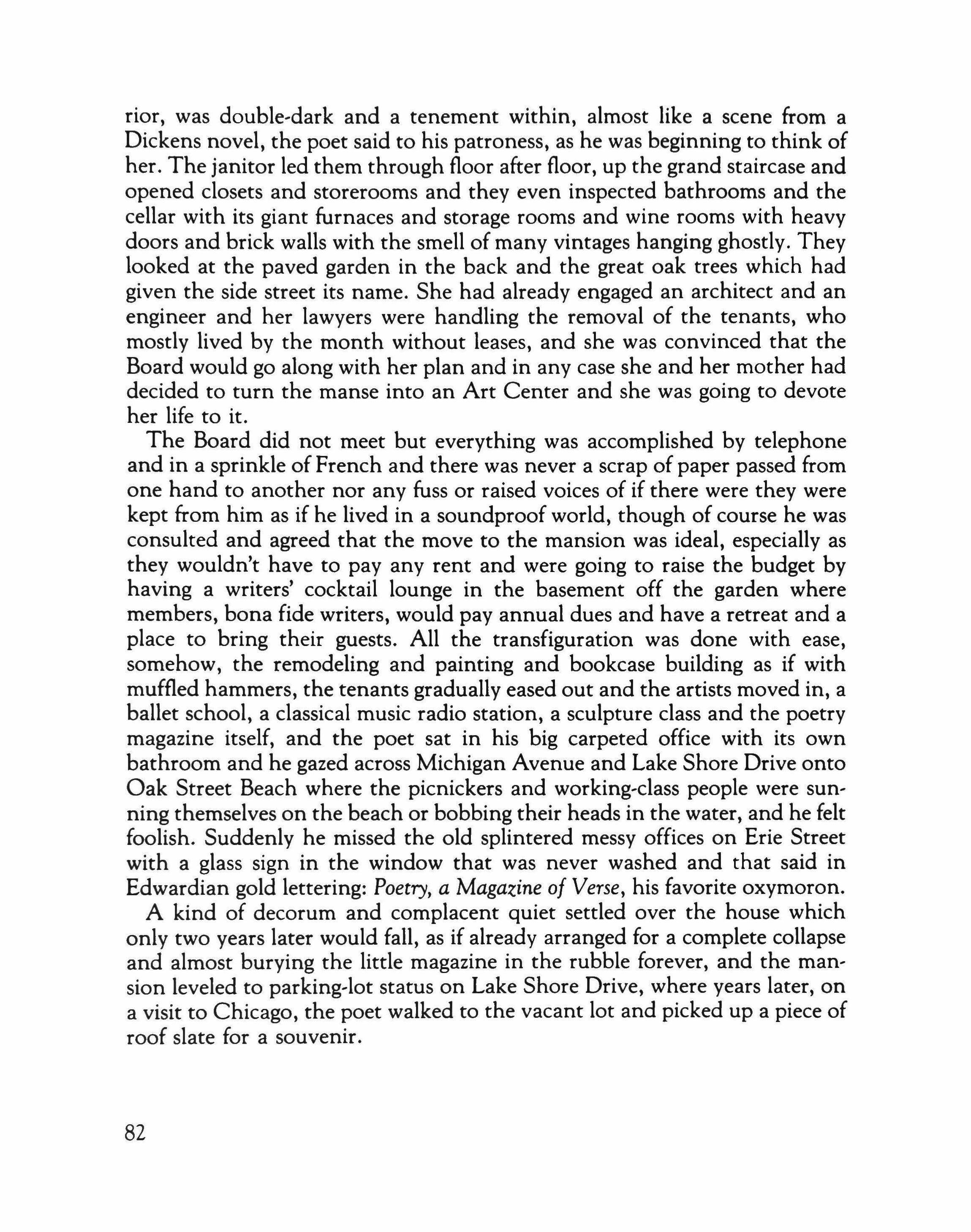
rior, was double-dark and a tenement within, almost like a scene from a Dickens novel, the poet said to his patroness, as he was beginning to think of her. The janitor led them through floor after floor, up the grand staircase and opened closets and storerooms and they even inspected bathrooms and the cellar with its giant furnaces and storage rooms and wine rooms with heavy doors and brick walls with the smell of many vintages hanging ghostly. They looked at the paved garden in the back and the great oak trees which had given the side street its name. She had already engaged an architect and an engineer and her lawyers were handling the removal of the tenants, who mostly lived by the month without leases, and she was convinced that the Board would go along with her plan and in any case she and her mother had decided to turn the manse into an Art Center and she was going to devote her life to it.
The Board did not meet but everything was accomplished by telephone and in a sprinkle of French and there was never a scrap of paper passed from one hand to another nor any fuss or raised voices of if there were they were kept from him as if he lived in a soundproof world, though of course he was consulted and agreed that the move to the mansion was ideal, especially as they wouldn't have to pay any rent and were going to raise the budget by having a writers' cocktail lounge in the basement off the garden where members, bona fide writers, would pay annual dues and have a retreat and a place to bring their guests. All the transfiguration was done with ease, somehow, the remodeling and painting and bookcase building as if with muffled hammers, the tenants gradually eased out and the artists moved in, a ballet school, a classical music radio station, a sculpture class and the poetry magazine itself, and the poet sat in his big carpeted office with its own bathroom and he gazed across Michigan Avenue and Lake Shore Drive onto Oak Street Beach where the picnickers and working-class people were sunning themselves on the beach or bobbing their heads in the water, and he felt foolish. Suddenly he missed the old splintered messy offices on Erie Street with a glass sign in the window that was never washed and that said in Edwardian gold lettering: Poetry, a Magazine of Verse, his favorite oxymoron.
A kind of decorum and complacent quiet settled over the house which only two years later would fall, as if already arranged for a complete collapse and almost burying the little magazine in the rubble forever, and the mansion leveled to parking-lot status on Lake Shore Drive, where years later, on a visit to Chicago, the poet walked to the vacant lot and picked up a piece of roof slate for a souvenir.
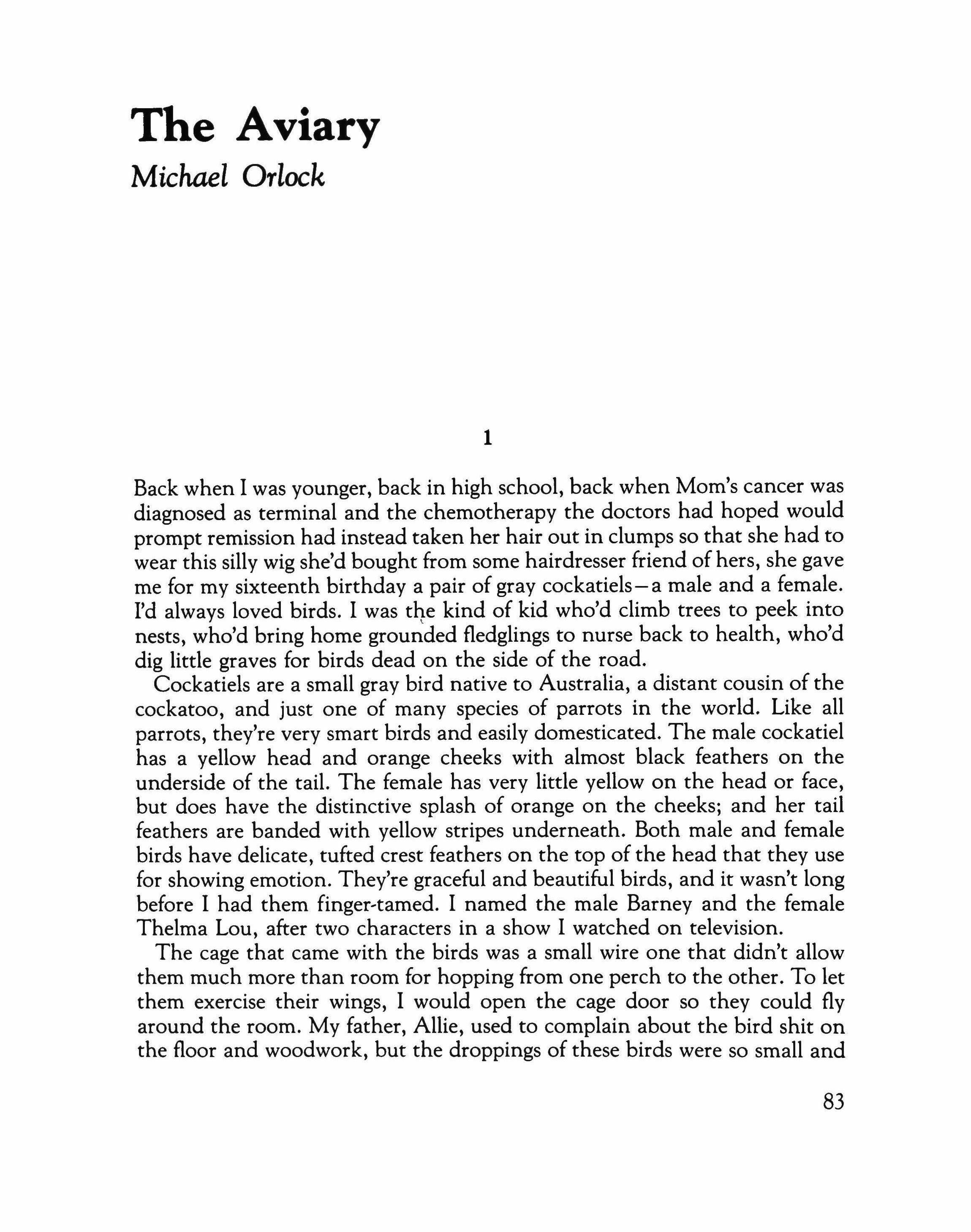
1
Back when I was younger, back in high school, back when Mom's cancer was diagnosed as terminal and the chemotherapy the doctors had hoped would prompt remission had instead taken her hair out in clumps so that she had to wear this silly wig she'd bought from some hairdresser friend of hers, she gave me for my sixteenth birthday a pair of gray cockatiels-a male and a female. I'd always loved birds. I was the kind of kid who'd climb trees to peek into nests, who'd bring home grounded fledglings to nurse back to health, who'd dig little graves for birds dead on the side of the road.
Cockatiels are a small gray bird native to Australia, a distant cousin of the cockatoo, and just one of many species of parrots in the world. Like all parrots, they're very smart birds and easily domesticated. The male cockatiel has a yellow head and orange cheeks with almost black feathers on the underside of the tail. The female has very little yellow on the head or face, but does have the distinctive splash of orange on the cheeks; and her tail feathers are banded with yellow stripes underneath. Both male and female birds have delicate, tufted crest feathers on the top of the head that they use for showing emotion. They're graceful and beautiful birds, and it wasn't long before I had them finger-tamed. I named the male Barney and the female Thelma Lou, after two characters in a show I watched on television.
The cage that came with the birds was a small wire one that didn't allow them much more than room for hopping from one perch to the other To let them exercise their wings, I would open the cage door so they could fly around the room. My father, Allie, used to complain about the bird shit on the floor and woodwork, but the droppings of these birds were so small and
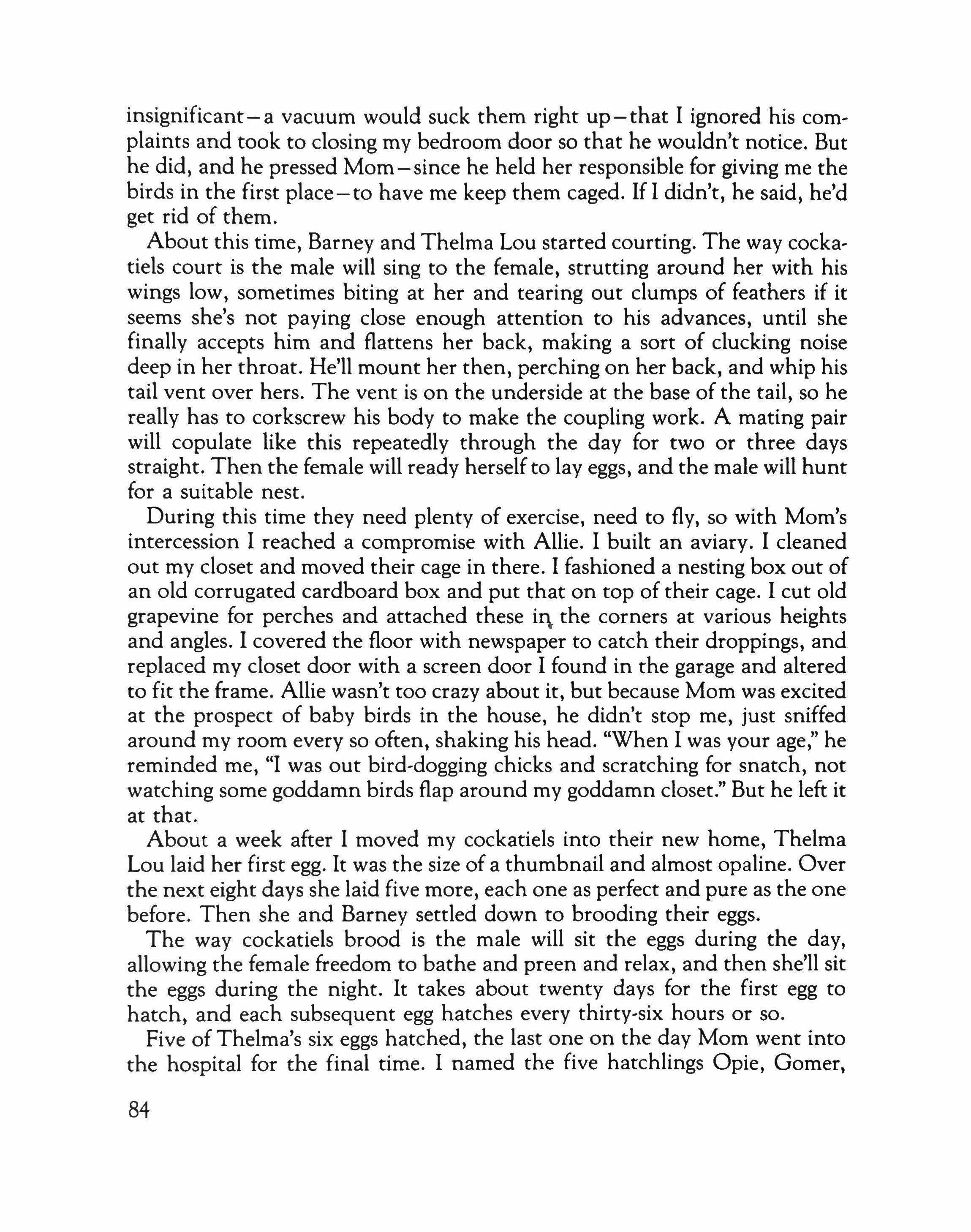
insignificant-a vacuum would suck them right up-that I ignored his com, plaints and took to closing my bedroom door so that he wouldn't notice. But he did, and he pressed Mom - since he held her responsible for giving me the birds in the first place-to have me keep them caged. If I didn't, he said, he'd get rid of them.
About this time, Barney and Thelma Lou started courting. The way cocka, tiels court is the male will sing to the female, strutting around her with his wings low, sometimes biting at her and tearing out clumps of feathers if it seems she's not paying close enough attention to his advances, until she finally accepts him and flattens her back, making a sort of clucking noise deep in her throat. He'll mount her then, perching on her back, and whip his tail vent over hers. The vent is on the underside at the base of the tail, so he really has to corkscrew his body to make the coupling work. A mating pair will copulate like this repeatedly through the day for two or three days straight. Then the female will ready herself to lay eggs, and the male will hunt for a suitable nest.
During this time they need plenty of exercise, need to fly, so with Mom's intercession I reached a compromise with Allie. I built an aviary. I cleaned out my closet and moved their cage in there. I fashioned a nesting box out of an old corrugated cardboard box and put that on top of their cage. I cut old grapevine for perches and attached these iq the corners at various heights and angles. I covered the floor with newspaper to catch their droppings, and replaced my closet door with a screen door I found in the garage and altered to fit the frame. Allie wasn't too crazy about it, but because Mom was excited at the prospect of baby birds in the house, he didn't stop me, just sniffed around my room every so often, shaking his head. "When I was your age," he reminded me, "I was out bird-dogging chicks and scratching for snatch, not watching some goddamn birds flap around my goddamn closet." But he left it at that.
About a week after I moved my cockatiels into their new home, Thelma Lou laid her first egg. It was the size of a thumbnail and almost opaline. Over the next eight days she laid five more, each one as perfect and pure as the one before. Then she and Barney settled down to brooding their eggs.
The way cockatiels brood is the male will sit the eggs during the day, allowing the female freedom to bathe and preen and relax, and then she'll sit the eggs during the night. It takes about twenty days for the first egg to hatch, and each subsequent egg hatches every thirty-six hours or so.
Five of Thelma's six eggs hatched, the last one on the day Mom went into the hospital for the final time. I named the five hatchlings Opie, Gomer,
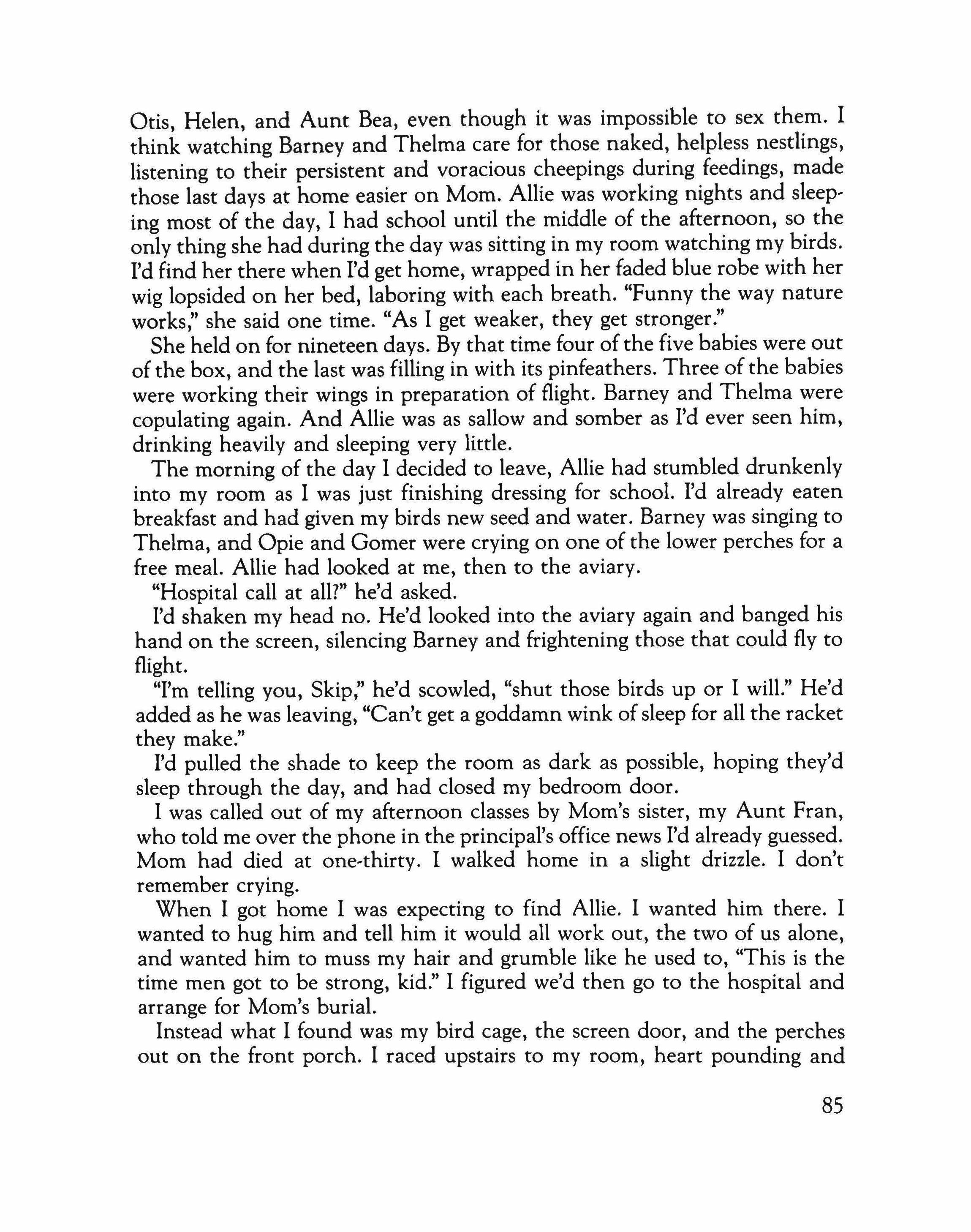
Otis, Helen, and Aunt Bea, even though it was impossible to sex them. I think watching Barney and Thelma care for those naked, helpless nestlings, listening to their persistent and voracious cheepings during feedings, made those last days at home easier on Mom. Allie was working nights and sleeping most of the day, I had school until the middle of the afternoon, so the only thing she had during the day was sitting in my room watching my birds. I'd find her there when I'd get home, wrapped in her faded blue robe with her wig lopsided on her bed, laboring with each breath. "Funny the way nature works:' she said one time. "As I get weaker, they get stronger."
She held on for nineteen days. By that time four ofthe five babies were out of the box, and the last was filling in with its pinfeathers. Three of the babies were working their wings in preparation of flight. Barney and Thelma were copulating again. And Allie was as sallow and somber as I'd ever seen him, drinking heavily and sleeping very little.
The morning of the day I decided to leave, Allie had stumbled drunkenly into my room as I was just finishing dressing for school. I'd already eaten breakfast and had given my birds new seed and water. Barney was singing to Thelma, and Opie and Gomer were crying on one of the lower perches for a free meal. Allie had looked at me, then to the aviary.
"Hospital call at all?" he'd asked.
I'd shaken my head no. He'd looked into the aviary again and banged his hand on the screen, silencing Barney and frightening those that could fly to flight.
"I'm telling you, Skip," he'd scowled, "shut those birds up or I will." He'd added as he was leaving, "Can't get a goddamn wink of sleep for all the racket they make."
I'd pulled the shade to keep the room as dark as possible, hoping they'd sleep through the day, and had closed my bedroom door.
I was called out of my afternoon classes by Mom's sister, my Aunt Fran, who told me over the phone in the principal's office news I'd already guessed. Mom had died at one-thirty. I walked home in a slight drizzle. I don't remember crying.
When I got home I was expecting to find Allie. I wanted him there. I wanted to hug him and tell him it would all work out, the two of us alone, and wanted him to muss my hair and grumble like he used to, "This is the time men got to be strong, kid." I figured we'd then go to the hospital and arrange for Mom's burial.
Instead what I found was my bird cage, the screen door, and the perches out on the front porch. I raced upstairs to my room, heart pounding and
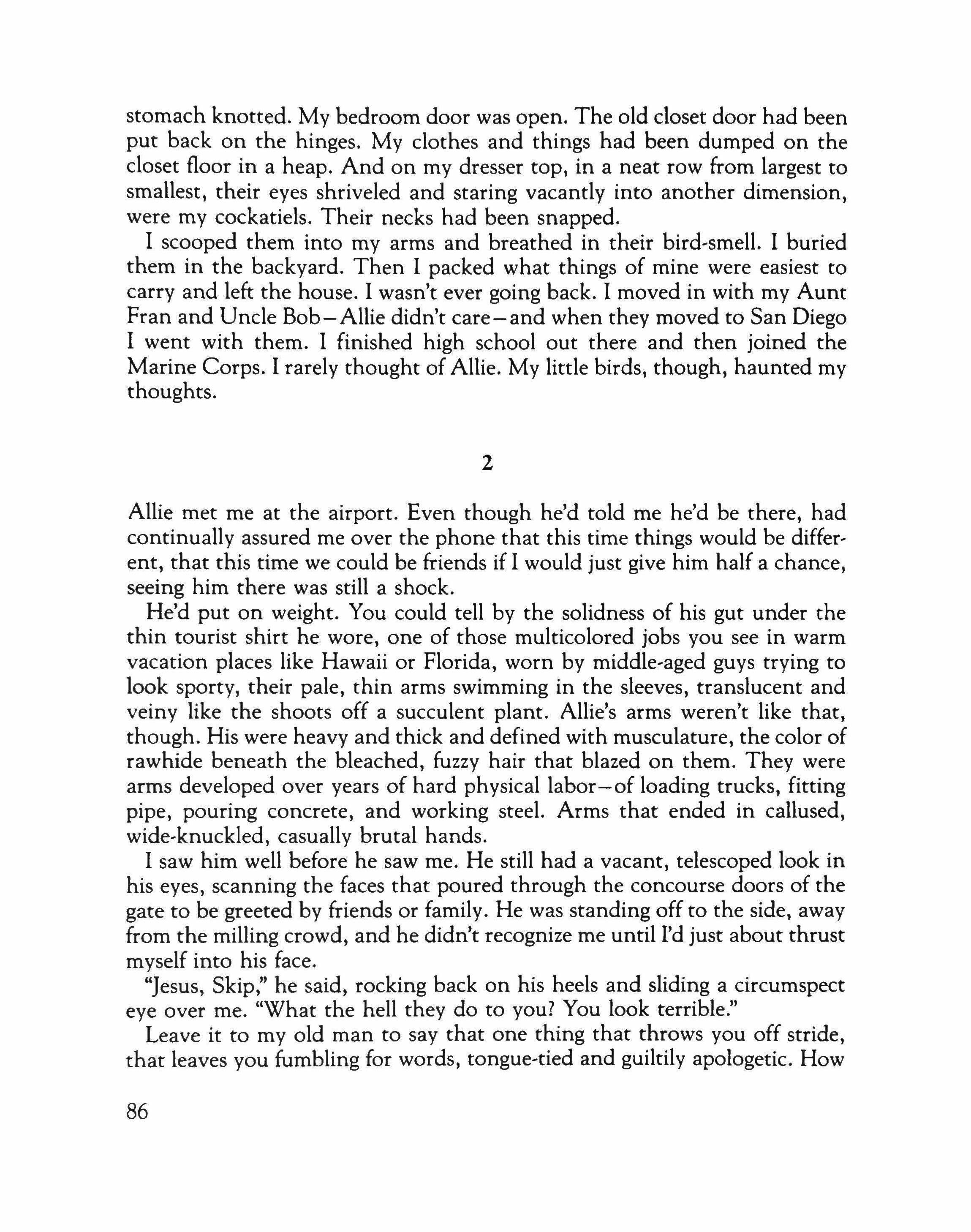
stomach knotted. My bedroom door was open. The old closet door had been put back on the hinges. My clothes and things had been dumped on the closet floor in a heap. And on my dresser top, in a neat row from largest to smallest, their eyes shriveled and staring vacantly into another dimension, were my cockatiels. Their necks had been snapped.
I scooped them into my arms and breathed in their bird-smell. I buried them in the backyard. Then I packed what things of mine were easiest to carry and left the house. I wasn't ever going back. I moved in with my Aunt Fran and Uncle Bob-Allie didn't care-and when they moved to San Diego I went with them. I finished high school out there and then joined the Marine Corps. I rarely thought of Allie. My little birds, though, haunted my thoughts.
2
Allie met me at the airport. Even though he'd told me he'd be there, had continually assured me over the phone that this time things would be different, that this time we could be friends if I would just give him half a chance, seeing him there was still a shock.
He'd put on weight. You could tell by the solidness of his gut under the thin tourist shirt he wore, one of those multicolored jobs you see in warm vacation places like Hawaii or Florida, worn by middle-aged guys trying to look sporty, their pale, thin arms swimming in the sleeves, translucent and veiny like the shoots off a succulent plant. Allie's arms weren't like that, though. His were heavy and thick and defined with musculature, the color of rawhide beneath the bleached, fuzzy hair that blazed on them. They were arms developed over years of hard physical labor-of loading trucks, fitting pipe, pouring concrete, and working steel. Arms that ended in callused, wide-knuckled, casually brutal hands.
I saw him well before he saw me. He still had a vacant, telescoped look in his eyes, scanning the faces that poured through the concourse doors of the gate to be greeted by friends or family. He was standing off to the side, away from the milling crowd, and he didn't recognize me until I'd just about thrust myself into his face.
"Jesus, Skip," he said, rocking back on his heels and sliding a circumspect eye over me. "What the hell they do to you? You look terrible."
Leave it to myoid man to say that one thing that throws you off stride, that leaves you fumbling for words, tongue-tied and guiltily apologetic. How
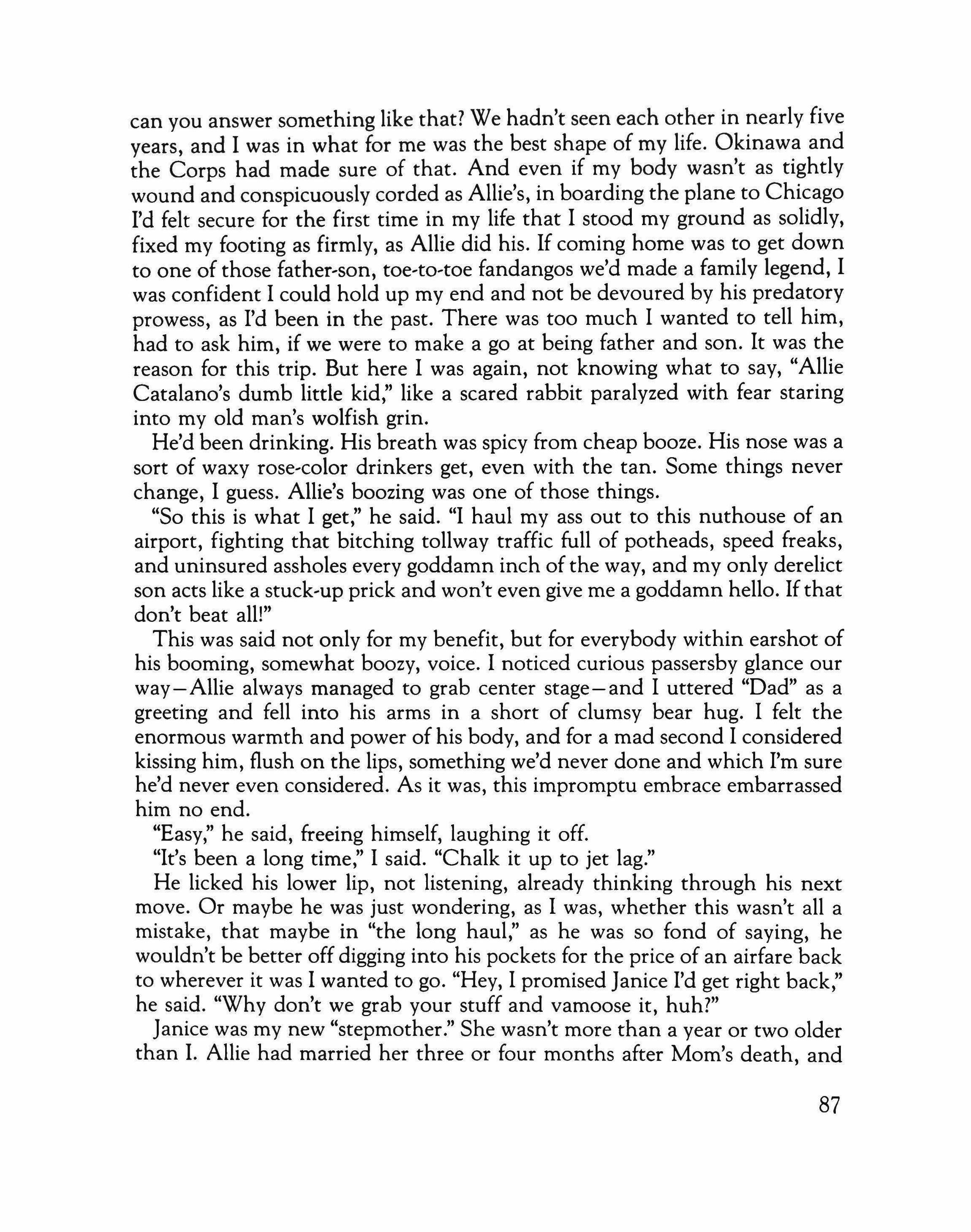
can you answer something like that? We hadn't seen each other in nearly five years, and I was in what for me was the best shape of my life. Okinawa and the Corps had made sure of that. And even if my body wasn't as tightly wound and conspicuously corded as Allie's, in boarding the plane to Chicago I'd felt secure for the first time in my life that I stood my ground as solidly, fixed my footing as firmly, as Allie did his. If coming home was to get down to one of those father-son, toe-to-toe fandangos we'd made a family legend, I was confident I could hold up my end and not be devoured by his predatory prowess, as I'd been in the past. There was too much I wanted to tell him, had to ask him, if we were to make a go at being father and son. It was the reason for this trip. But here I was again, not knowing what to say, "Allie Catalano's dumb little kid:' like a scared rabbit paralyzed with fear staring into myoid man's wolfish grin.
He'd been drinking. His breath was spicy from cheap booze. His nose was a sort of waxy rose-color drinkers get, even with the tan. Some things never change, I guess. Allie's boozing was one of those things.
"So this is what I get:' he said. "I haul my ass out to this nuthouse of an airport, fighting that bitching tollway traffic full of potheads, speed freaks, and uninsured assholes every goddamn inch of the way, and my only derelict son acts like a stuck-up prick and won't even give me a goddamn hello. If that don't beat all!"
This was said not only for my benefit, but for everybody within earshot of his booming, somewhat boozy, voice. I noticed curious passersby glance our way-Allie always managed to grab center stage-and I uttered "Dad" as a greeting and fell into his arms in a short of clumsy bear hug. I felt the enormous warmth and power of his body, and for a mad second I considered kissing him, flush on the lips, something we'd never done and which I'm sure he'd never even considered. As it was, this impromptu embrace embarrassed him no end.
"Easy," he said, freeing himself, laughing it off.
"It's been a long time," I said. "Chalk it up to jet lag."
He licked his lower lip, not listening, already thinking through his next move. Or maybe he was just wondering, as I was, whether this wasn't all a mistake, that maybe in "the long haul," as he was so fond of saying, he wouldn't be better off digging into his pockets for the price of an airfare back to wherever it was I wanted to go. "Hey, I promised Janice I'd get right back:' he said. "Why don't we grab your stuff and vamoose it, huh?"
Janice was my new "stepmother." She wasn't more than a year or two older than I. Allie had married her three or four months after Mom's death, and
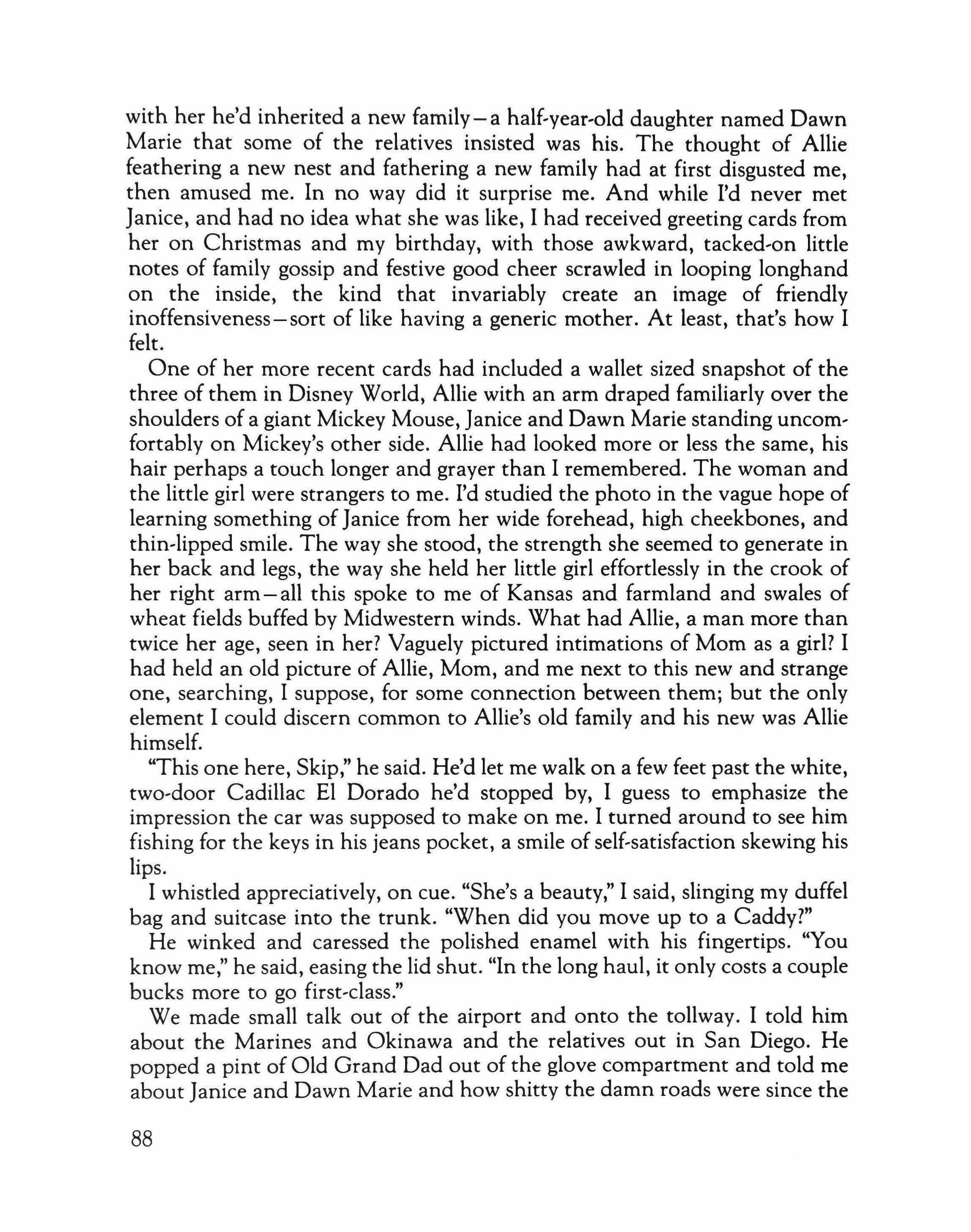
with her he'd inherited a new family-a half-year-old daughter named Dawn Marie that some of the relatives insisted was his. The thought of Allie feathering a new nest and fathering a new family had at first disgusted me, then amused me. In no way did it surprise me. And while I'd never met janice, and had no idea what she was like, I had received greeting cards from her on Christmas and my birthday, with those awkward, tacked-on little notes of family gossip and festive good cheer scrawled in looping longhand on the inside, the kind that invariably create an image of friendly inoffensiveness-sort of like having a generic mother. At least, that's how I felt.
One of her more recent cards had included a wallet sized snapshot of the three of them in Disney World, Allie with an arm draped familiarly over the shoulders of a giant Mickey Mouse, janice and Dawn Marie standing uncomfortably on Mickey's other side. Allie had looked more or less the same, his hair perhaps a touch longer and grayer than I remembered. The woman and the little girl were strangers to me. I'd studied the photo in the vague hope of learning something of janice from her wide forehead, high cheekbones, and thin-lipped smile. The way she stood, the strength she seemed to generate in her back and legs, the way she held her little girl effortlessly in the crook of her right arm - all this spoke to me of Kansas and farmland and swales of wheat fields buffed by Midwestern winds. What had Allie, a man more than twice her age, seen in her? Vaguely pictured intimations of Mom as a girl? I had held an old picture of Allie, Mom, and me next to this new and strange one, searching, I suppose, for some connection between them; but the only element I could discern common to Allie's old family and his new was Allie himself.
"This one here, Skip," he said. He'd let me walk on a few feet past the white, two-door Cadillac EI Dorado he'd stopped by, I guess to emphasize the impression the car was supposed to make on me. I turned around to see him fishing for the keys in his jeans pocket, a smile of self-satisfaction skewing his lips.
I whistled appreciatively, on cue. "She's a beauty," I said, slinging my duffel bag and suitcase into the trunk. "When did you move up to a Caddy?"
He winked and caressed the polished enamel with his fingertips. "You know me," he said, easing the lid shut. "In the long haul, it only costs a couple bucks more to go first-class,"
We made small talk out of the airport and onto the tollway. I told him about the Marines and Okinawa and the relatives out in San Diego. He popped a pint of Old Grand Dad out of the glove compartment and told me about janice and Dawn Marie and how shitty the damn roads were since the
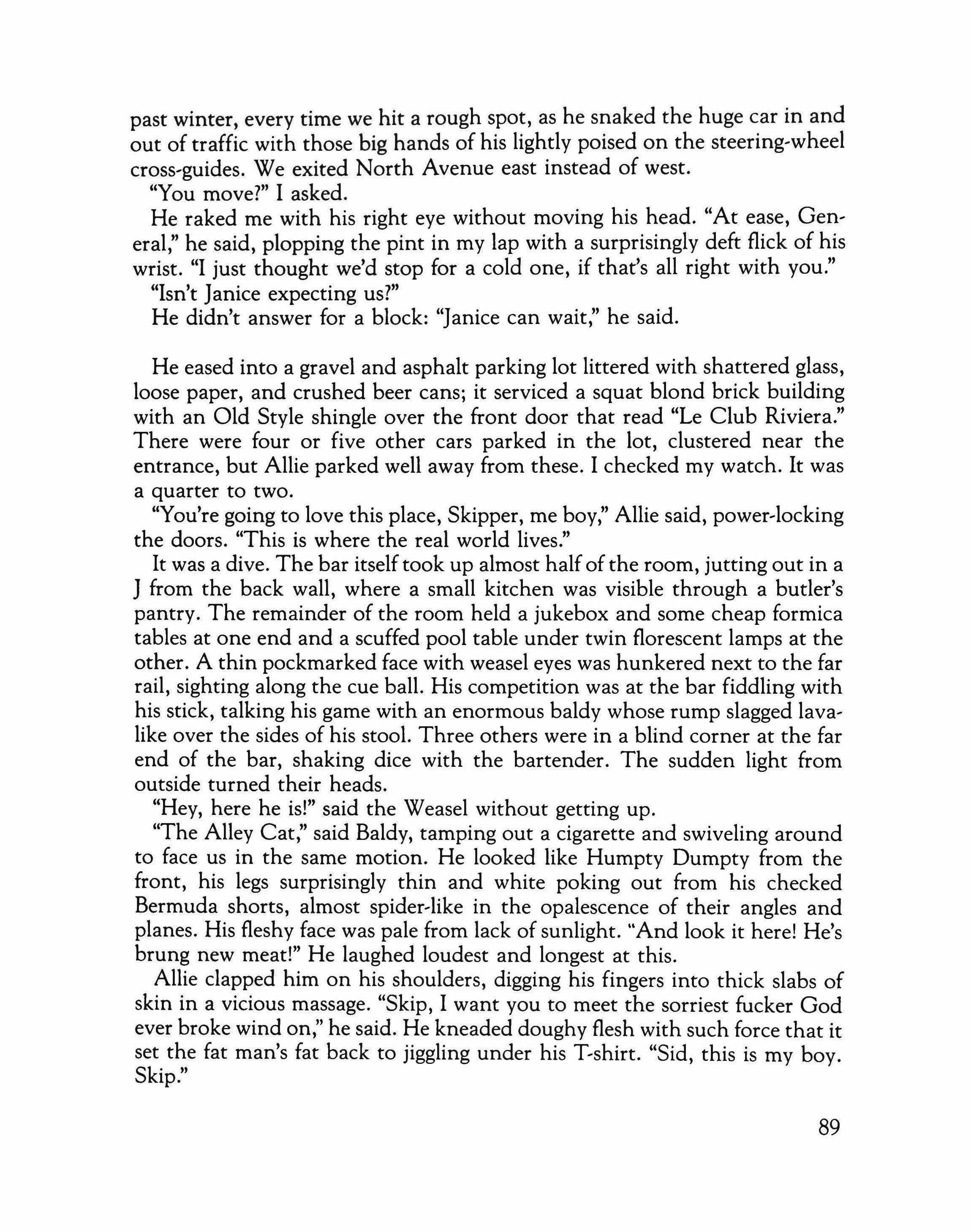
past winter, every time we hit a rough spot, as he snaked the huge car in and out of traffic with those big hands of his lightly poised on the steering-wheel cross-guides. We exited North Avenue east instead of west.
"You move?" I asked.
He raked me with his right eye without moving his head. "At ease, General," he said, plopping the pint in my lap with a surprisingly deft flick of his wrist. "I just thought we'd stop for a cold one, if that's all right with you."
"Isn't Janice expecting us?"
He didn't answer for a block: "Janice can wait," he said.
He eased into a gravel and asphalt parking lot littered with shattered glass, loose paper, and crushed beer cans; it serviced a squat blond brick building with an Old Style shingle over the front door that read "Le Club Riviera." There were four or five other cars parked in the lot, clustered near the entrance, but Allie parked well away from these. I checked my watch. It was a quarter to two.
"You're going to love this place, Skipper, me boy," Allie said, power-locking the doors. "This is where the real world lives."
It was a dive. The bar itselftook up almost halfofthe room, jutting out in a J from the back wall, where a small kitchen was visible through a butler's pantry. The remainder of the room held a jukebox and some cheap formica tables at one end and a scuffed pool table under twin florescent lamps at the other. A thin pockmarked face with weasel eyes was hunkered next to the far rail, sighting along the cue ball. His competition was at the bar fiddling with his stick, talking his game with an enormous baldy whose rump slagged lava, like over the sides of his stool. Three others were in a blind corner at the far end of the bar, shaking dice with the bartender. The sudden light from outside turned their heads.
"Hey, here he is!" said the Weasel without getting up.
"The Alley Cat:' said Baldy, tamping out a cigarette and swiveling around to face us in the same motion. He looked like Humpty Dumpty from the front, his legs surprisingly thin and white poking out from his checked Bermuda shorts, almost spider-like in the opalescence of their angles and planes. His fleshy face was pale from lack of sunlight. "And look it here! He's brung new meat!" He laughed loudest and longest at this.
Allie clapped him on his shoulders, digging his fingers into thick slabs of skin in a vicious massage. "Skip, I want you to meet the sorriest fucker Ood ever broke wind on," he said. He kneaded doughy flesh with such force that it set the fat man's fat back to jiggling under his T'shirt. "Sid, this is my boy. Skip."

"I know who it is," he said. "You only been telling us about the kid a month now."
He thrust his hand into mine. His fingers were stubby and formless, like the tiny homemade sausages Mom used to make, but his grip was firm. "How you doin', Skip?" he said, circling his lips with his pink tongue. "Allie says you're going to be a college boy?"
"I'm going to try," I allowed. "Where?"
"Illinois. Champaign. I'd like to get into computers. That's what I did in the Marines, at any rate."
"That's good," he said.
Allie slid onto the stool next to him, leaving me to hang there, Sid still clutching my hand. He smiled sideways into Allie's face.
"College ain't worth shit," said rhe Weasel, chalking his cue. "I know."
''Yeah?'' said Allie over his shoulder. "How would you know? You ever been?"
"No," he said. "But my brother-in-law went, and he's still the dumbest son of a bitch I ever met."
"That's cause he married your sister," someone at the end of the bar shot back.
The Weasel pinched his nose, meditatively. All eyes were on him and he knew it. "Yeah," he said, shrugging into the idea like it was a new coat, "you may be right. I never thought of it that way. But -" he pointed his stick in emphasis, "that only proves my point. College made him stupider."
The bartender had ambled his way to our end and drawn a draft that he set in front of Allie.
"Since your old man ain't got no manners," Sid said, winking slyly with one eye, "I'll introduce you to these uneducated, drunken derelicts-"
"Fuck you, Sid," said the Weasel. He pocketed the nine in the near corner and anxiously hopped to the far side of the table to check his setup.
"Mister Eloquence over there is Jason. Forget about him. He's a prick. This here is Mike," he said, motioning to the kid with the stick just draining his glass ofbeer. He was tall and slender, about my size but minus the build, with long, straggly hair tied back with a leather string and a droopy mustache that was in need of trimming. The longer hairs curled into his mouth and were wet from his beer. He nodded my way and turned to watch Jason.
"What'll it be?" the bartender said to me, hands spread on the bar.
"That's Jules;' said Sid, turning to the guy and finally letting go my hand. It was clammy and hot from his.
"He'll have the same," Allie said, digging for his wallet with his right hand, jabbing the thumb of his left my way. He plopped a twenty on the bar.
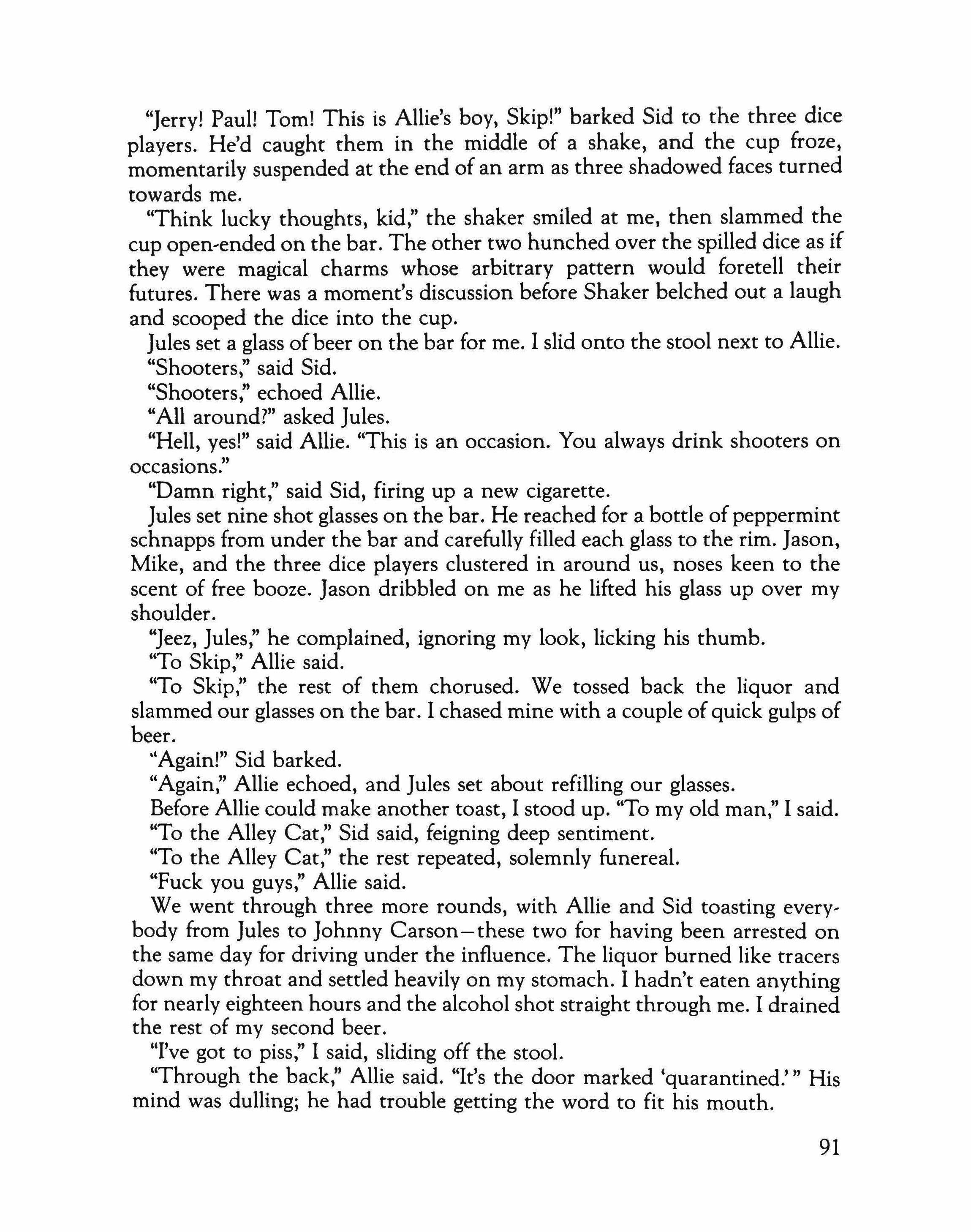
"Jerry! Paul! Tom! This is Allie's boy, Skip!" barked Sid to the three dice players. He'd caught them in the middle of a shake, and the cup froze, momentarily suspended at the end of an arm as three shadowed faces turned towards me.
"Think lucky thoughts, kid," the shaker smiled at me, then slammed the cup open-ended on the bar. The other two hunched over the spilled dice as if they were magical charms whose arbitrary pattern would foretell their futures. There was a moment's discussion before Shaker belched out a laugh and scooped the dice into the cup.
Jules set a glass ofbeer on the bar for me. I slid onto the stool next to Allie.
"Shooters;' said Sid.
"Shooters;' echoed Allie.
"All around?" asked Jules.
"Hell, yes!" said Allie. "This is an occasion. You always drink shooters on occasions."
"Damn right," said Sid, firing up a new cigarette.
Jules set nine shot glasses on the bar. He reached for a bottle ofpeppermint schnapps from under the bar and carefully filled each glass to the rim. Jason, Mike, and the three dice players clustered in around us, noses keen to the scent of free booze. Jason dribbled on me as he lifted his glass up over my shoulder.
"[eez, Jules;' he complained, ignoring my look, licking his thumb.
"To Skip," Allie said.
"To Skip;' the rest of them chorused. We tossed back the liquor and slammed our glasses on the bar. I chased mine with a couple of quick gulps of beer.
"Again!" Sid barked.
"Again," Allie echoed, and Jules set about refilling our glasses. Before Allie could make another toast, I stood up. "To myoid man," I said.
"To the Alley Cat," Sid said, feigning deep sentiment.
"To the Alley Cat," the rest repeated, solemnly funereal.
"Fuck you guys," Allie said.
We went through three more rounds, with Allie and Sid toasting every, body from Jules to Johnny Carson - these two for having been arrested on the same day for driving under the influence. The liquor burned like tracers down my throat and settled heavily on my stomach. I hadn't eaten anything for nearly eighteen hours and the alcohol shot straight through me. I drained the rest of my second beer.
"I've got to piss," I said, sliding off the stool.
"Through the back," Allie said. "It's the door marked 'quarantined.'" His mind was dulling; he had trouble getting the word to fit his mouth.
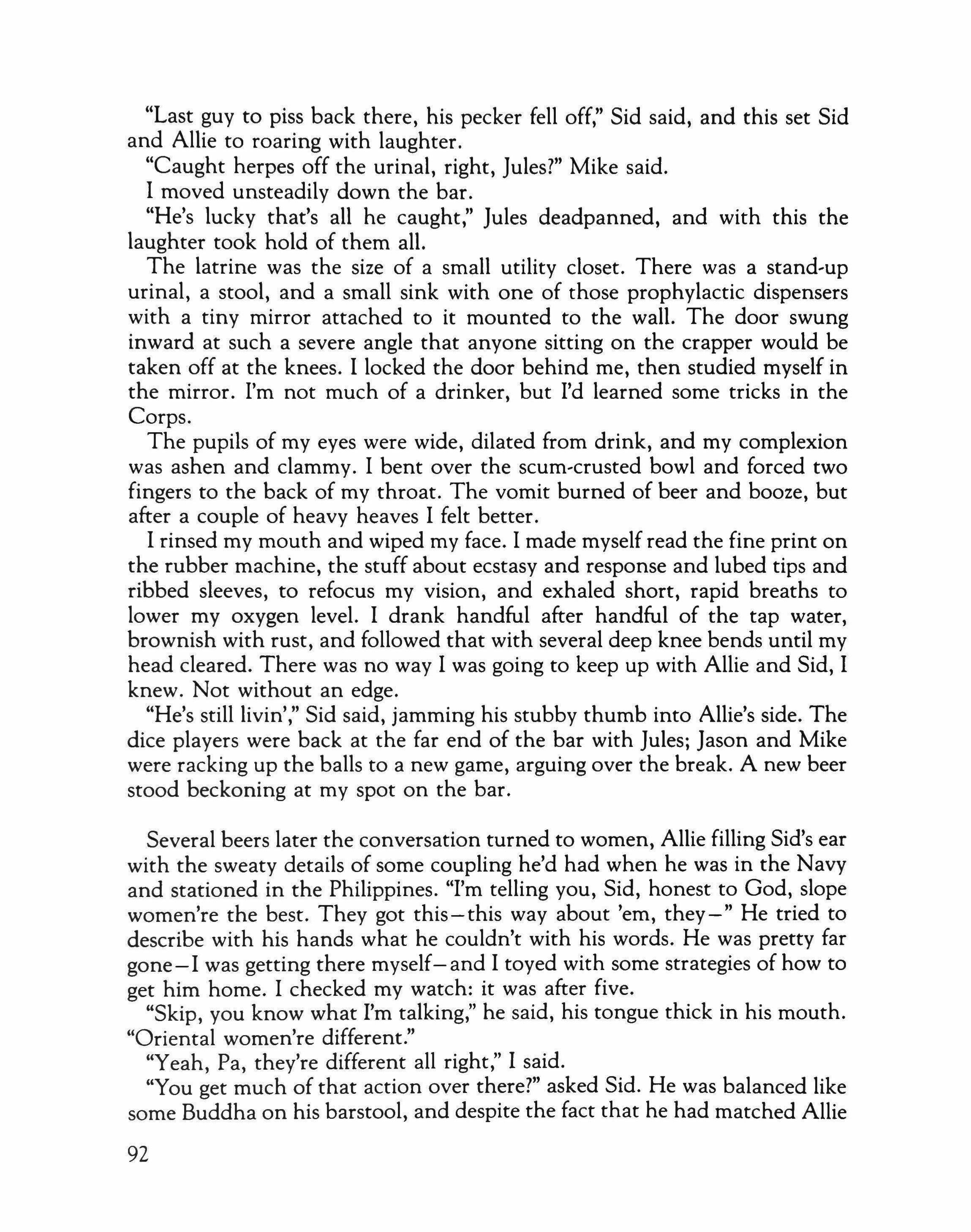
"Last guy to piss back there, his peeker fell off," Sid said, and this set Sid and Allie to roaring with laughter.
"Caught herpes off the urinal, right, Jules?" Mike said.
I moved unsteadily down the bar.
"He's lucky that's all he caught," Jules deadpanned, and with this the laughter took hold of them all.
The latrine was the size of a small utility closet. There was a stand-up urinal, a stool, and a small sink with one of those prophylactic dispensers with a tiny mirror attached to it mounted to the wall. The door swung inward at such a severe angle that anyone sitting on the crapper would be taken off at the knees. I locked the door behind me, then studied myself in the mirror. I'm not much of a drinker, but I'd learned some tricks in the Corps.
The pupils of my eyes were wide, dilated from drink, and my complexion was ashen and clammy. I bent over the scum-crusted bowl and forced two fingers to the back of my throat. The vomit burned of beer and booze, but after a couple of heavy heaves I felt better.
I rinsed my mouth and wiped my face. I made myself read the fine print on the rubber machine, the stuff about ecstasy and response and lubed tips and ribbed sleeves, to refocus my vision, and exhaled short, rapid breaths to lower my oxygen level. I drank handful after handful of the tap water, brownish with rust, and followed that with several deep knee bends until my head cleared. There was no way I was going to keep up with Allie and Sid, I knew. Not without an edge.
"He's stilllivin'," Sid said, jamming his stubby thumb into Allie's side. The dice players were back at the far end of the bar with Jules; Jason and Mike were racking up the balls to a new game, arguing over the break. A new beer stood beckoning at my spot on the bar.
Several beers later the conversation turned to women, Allie filling Sid's ear with the sweaty details of some coupling he'd had when he was in the Navy and stationed in the Philippines. "I'm telling you, Sid, honest to God, slope women're the best. They got this-this way about 'em, they-" He tried to describe with his hands what he couldn't with his words. He was pretty far gone-I was getting there myself-and I toyed with some strategies of how to get him home. I checked my watch: it was after five.
"Skip, you know what I'm talking," he said, his tongue thick in his mouth. "Oriental women're different."
"Yeah, Pa, they're different all right," I said.
"You get much of that action over there?" asked Sid. He was balanced like some Buddha on his barstool, and despite the fact that he had matched Allie
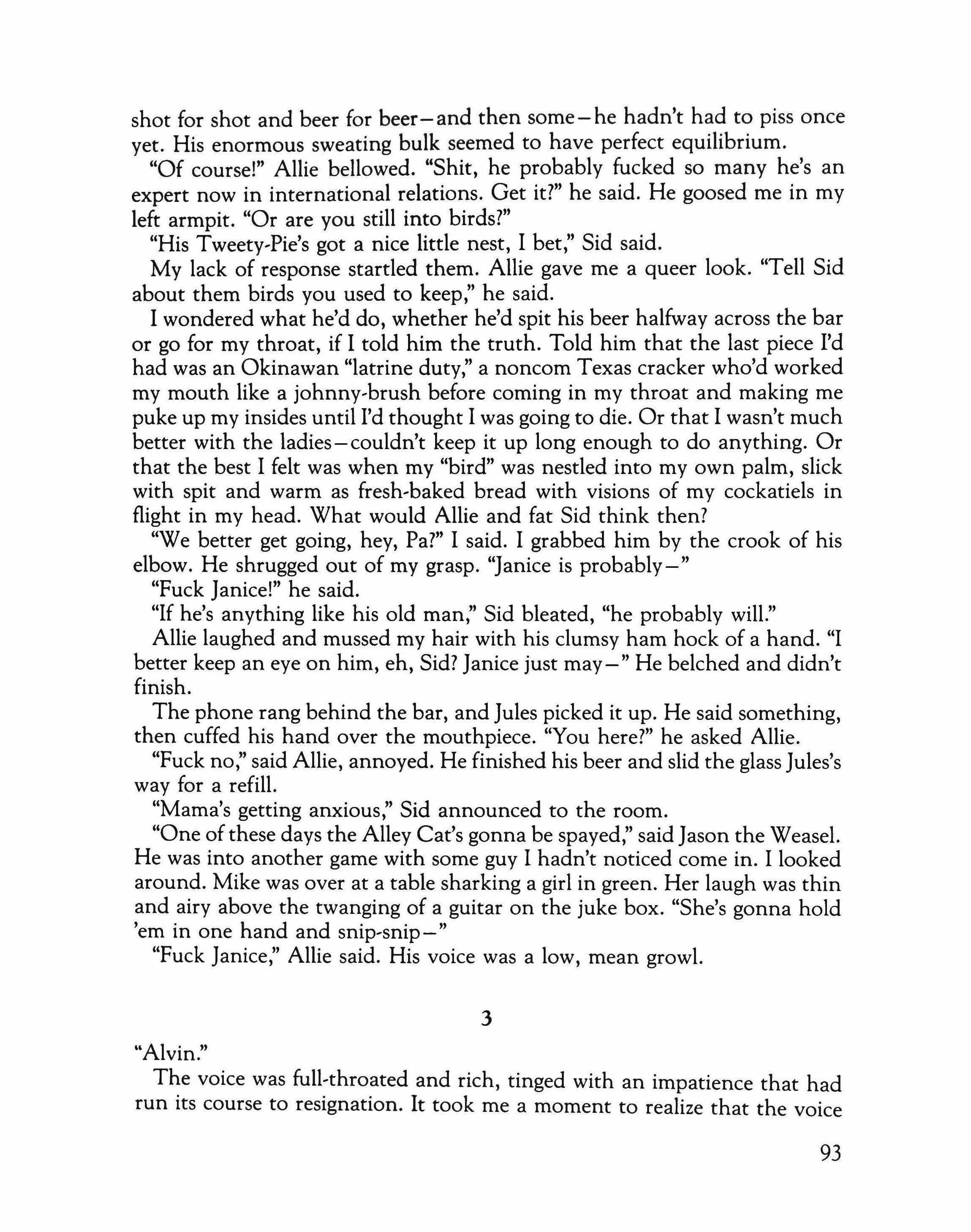
shot for shot and beer for beer-and then some-he hadn't had to piss once yet. His enormous sweating bulk seemed to have perfect equilibrium.
"Of course!" Allie bellowed. "Shit, he probably fucked so many he's an expert now in international relations. Get it?" he said. He goosed me in my left armpit. "Or are you still into birds?"
"His Tweety-Pie's got a nice little nest, I bet," Sid said.
My lack of response startled them. Allie gave me a queer look. "Tell Sid about them birds you used to keep," he said.
I wondered what he'd do, whether he'd spit his beer halfway across the bar or go for my throat, if I told him the truth. Told him that the last piece I'd had was an Okinawan "latrine duty:' a noncom Texas cracker who'd worked my mouth like a johnny-brush before coming in my throat and making me puke up my insides until I'd thought I was going to die. Or that I wasn't much better with the ladies-couldn't keep it up long enough to do anything. Or that the best I felt was when my "bird" was nestled into my own palm, slick with spit and warm as fresh-baked bread with visions of my cockatiels in flight in my head. What would Allie and fat Sid think then?
"We better get going, hey, Pa?" I said. I grabbed him by the crook of his elbow. He shrugged out of my grasp. "Janice is probably-"
"Fuck Janice!" he said.
"If he's anything like his old man," Sid bleated, "he probably will." Allie laughed and mussed my hair with his clumsy ham hock of a hand. "I better keep an eye on him, eh, Sid? Janice just may-" He belched and didn't finish.
The phone rang behind the bar, and Jules picked it up. He said something, then cuffed his hand over the mouthpiece. "You here?" he asked Allie.
"Fuck no:' said Allie, annoyed. He finished his beer and slid the glassJules's way for a refill.
"Mama's getting anxious:' Sid announced to the room.
"One ofthese days the Alley Cat's gonna be spayed," said Jason the Weasel. He was into another game with some guy I hadn't noticed come in. I looked around. Mike was over at a table sharking a girl in green. Her laugh was thin and airy above the twanging of a guitar on the juke box. "She's gonna hold 'em in one hand and snip,snip-"
"Fuck Janice," Allie said. His voice was a low, mean growl. 3
The voice was full-throared and rich, tinged with an impatience that had run its course to resignation. It took me a moment to realize that the voice

was addressing Allie. I don't think I'd ever heard anybody call him Alvinwith the exception of Orandmom Catalano, and she only once when he'd told a dirty joke at Thanksgiving dinner.
Allie didn't miss a beat, didn't even turn around or act surprised in the slightest; he just stared into the amber fizz of his beer, his big hands rolling the glass in circles on its base. "00 home, Janice," he said.
She had the little girl, Dawn Marie, with her, clutched by one hand. She was a tiny girl-although larger already than in the snapshot of them at Disney World-with a tiny, elliptical face almost lost under a mass of Shirley Temple curls. She stared up at me with wide, unblinking eyes. I must have frightened her, or maybe it was being in such a dark and noisy place, since over the past couple of hours a steady stream of people had poured in from outside and few had left, for she signaled her mother in some way to reach down and scoop her up into the crook of her arm. She kept those wide unblinking eyes on me the entire time.
Janice was a plainer woman than I'd guessed from her photograph. But it could have been that she hadn't had the time to make herself up, or wanted to. Her auburn hair was pulled back into a ponytail and clipped up with a barrette. One wisp of hair had escaped the severe pull of the rubber band, though, and fell heartbreakingly across her forehead and down her cheek. I felt an impulse to reach out and gently tuck that strand of hair behind her ear, to fold her into my arms and take her out of his dive and into a new life. But I was Allie's boy and probably would have fallen offthe stool, scaring her and her little girl into flight.
"Oh-oh," Sid said, cocking his head conspiratorially towards Allie. "Everybody hide."
Janice ignored him. "Alvin," she repeated, more firmly.
"00 home, Janice," Allie said.
"I can't:' she said. "Suzanne dropped me off. Let me have the keys to the car and I'll drive you home."
"That's too bad:' Allie said. "I guess you'll have to wait or walk home, 'cause I ain't ready to leave yet."
"Sid," she pleaded. "Will you help me?"
"Sorry, Jan," he said, exhaling twin plumes of smoke through his cavernous nostrils. "Allie's a big boy. I can't make him do stuff he don't want. Why, he'd break me in two."
I almost laughed at the idea of Allie or anybody struggling to lift that lard ass with anything smaller than a crane.
"Are you Skip?" she said to me. "Will you help me?"
I turned from her to Allie. His right eyeball was waiting for me, studying

me for a glimmer of betrayal. In Allie's view of the world, it always got down to taking sides.
"Will you help me get your father home?" Janice said. She waited. He waited. I weighed everything. It was the little girl who helped me decide. She smiled at me, a sweet and pure smile far above the sordidness ofthe place and the moment.
"Sure:' I said-to Janice, to Allie. "It's time to go."
Allie kicked the stool out from under himself. He slammed some money on the bar, brushed aside Sid's observation that the time had come to bring down the hammer, and stalked out into the parking lot so briskly that when Janice, Dawn Marie, and I were just stepping out into the night, he was already fumbling the key into the lock of his car.
"Alvin!" Janice called. "Let me drive!"
"Shut up, Janice!" he roared. He'd worked the key into the lock and flung open the door.
"Skip-" Janice turned to me.
"Skip!" Allie growled. "Get in the back seat of the car or I'll fucking kill you!" His hands balled into enormous fists. I stood there uncertainly. His eyes narrowed.
"Do what he says:' Janice said, under her breath. "Let's just get him home." I climbed into the back. Dawn Marie reached out for me, so I took her from Janice and nestled her on my lap. She was light as feathers and warm as a furnace. She was wearing a little sun dress underneath her sweater, and the skirt rode up her back and bunched against my stomach as she snuggled into the seat the contours of my body offered her. Janice slid in next to Allie.
He started up the car with a too-heavy foot on the accelerator. The engine raced in an agonizing whine.
"Please be careful," Janice said.
"Shut up:' Allie hissed. "Don't even breathe a fucking word."
He slammed the car into reverse and left a memory of rubber on the asphalt as he burned out of the parking lot and weaved out onto the road. He shot across traffic and up over the raised concrete median strip that divided the east lanes from the west. Dawn Marie dug her fingers into my arms. My head almost hit the roof.
"Allie -" Janice protested.
"I told you to shut up, bitch," he said. "Another word out of you and it'll be your last."
"Where do you think you can come off talking to me like that?" she demanded.

"Keep pushing, Jan. Just keep pushing. I'll kick your ass out right now."
"You think it's that easy, huh?"
"I'm warning you to shut the fuck up."
"No, I won't shut up. It's about time you sobered up," she spat. "Or are you and Sid intent on being the oldest drunks on the block?"
He tried to backhand her but missed. We blew through a red light, cutting in front of one of those toy-like Japanese sports cars. It skidded sideways across the intersection, horn blaring.
"Jesus, Dad," I said, heart thumping in my chest. The little girl on my lap was in a trance.
"You're sick," Janice said at length. "You're sick and I don't know if I can help you." She pressed against the car door and looked back at me. In the rush of oncoming headlights I could see her begin to cry.
"You're through," Allie said quietly to Janice. He'd shut off the car in the wide part of the driveway near the garage.
The house was dark. It had been so long since I'd last seen it that I found myselfcompulsively studying it in what little moonlight there was. It was still a brown-shingled Aframe with a small front porch. Two bedroom windows still yawned like empty mouths from the upstairs. The one on the right had been my room, where I'd kept my birds. I guessed it was Dawn Marie's room now. I wondered what it would look like decorated for a little girl, whether there would be anything left of me within the four walls, or any trace of the beautiful gray cockatiels that used to love gliding from the top of the closet door to the window sill and back, singing to me.
"I want you out tonight," Allie said.
Dawn Marie started crying and crawled over the seat into her mother's arms.
"Thanks, Skip," Janice said. From the tone of her voice, I didn't know if she was being sarcastic. She opened her door and crossed in front of the car towards the house, Dawn Marie still crying in her arms.
"Didn't you hear what I said?" Allie yelled after her. "You're through! You're out! I can do better than you on my worst day."
She didn't pause a step. Allie scrambled from the car and banged his door shut before I could squeeze out. I slid out Janice's side.
"Janice!" he roared, standing beside the Cadillac. "Janice!" When words wouldn't stop her, he kicked in the car door with the heel of his right foot.
She stopped and turned. Her jaw set in disgust.
"Brilliant move, Alvin," she said. "You wipe out our savings buying the damn thing, and now you're going to trash it."
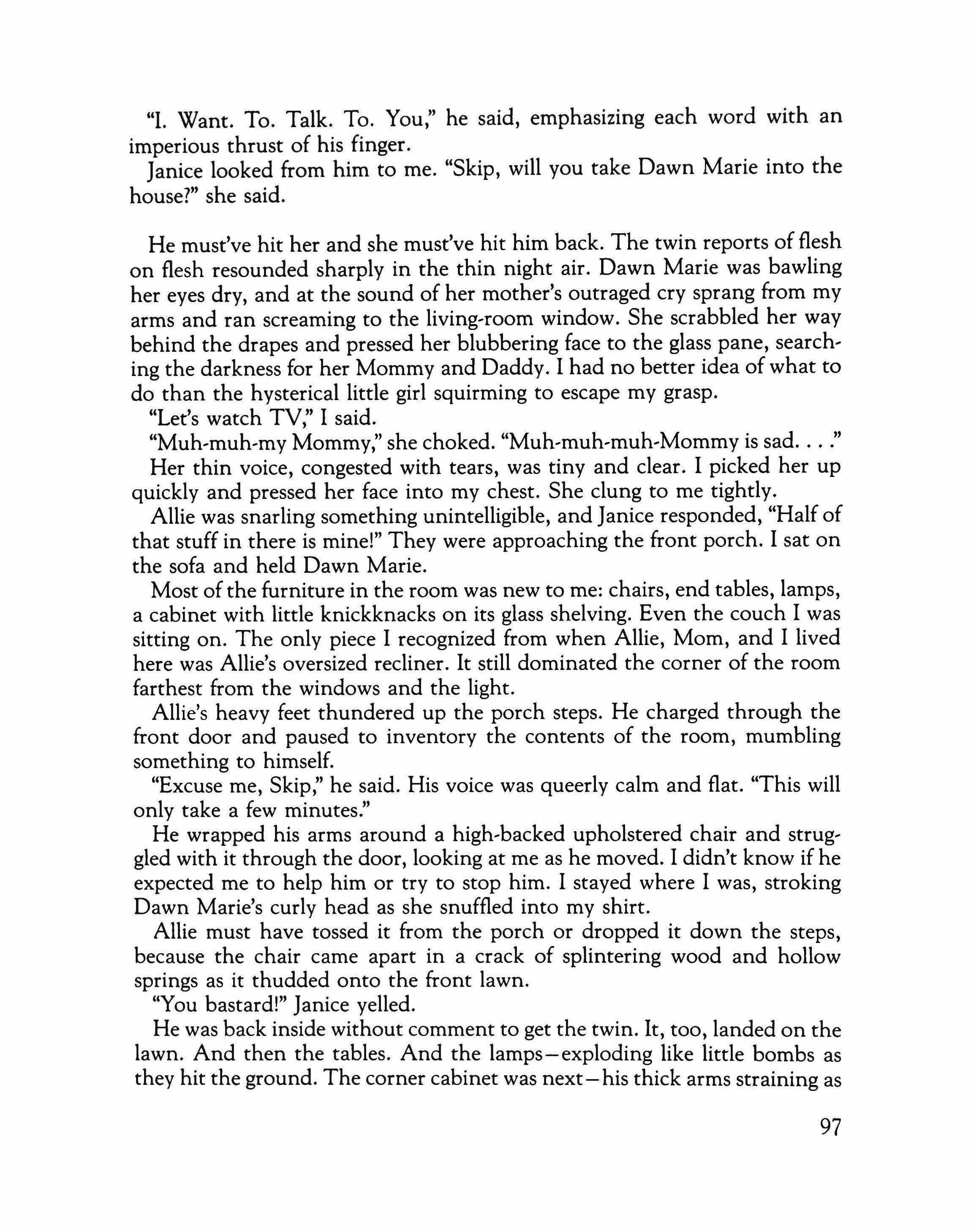
"I. Want. To. Talk. To. You," he said, emphasizing each word with an imperious thrust of his finger.
Janice looked from him to me. "Skip, will you take Dawn Marie into the house?" she said.
He must've hit her and she must've hit him back. The twin reports of flesh on flesh resounded sharply in the thin night air. Dawn Marie was bawling her eyes dry, and at the sound of her mother's outraged cry sprang from my arms and ran screaming to the living-room window. She scrabbled her way behind the drapes and pressed her blubbering face to the glass pane, searching the darkness for her Mommy and Daddy. I had no better idea of what to do than the hysterical little girl squirming to escape my grasp.
"Let's watch TV:' I said.
"Muh-rnuh-mv Mommy," she choked. "Muh-rnuh-muh-Mornmv is sad
Her thin voice, congested with tears, was tiny and clear. I picked her up quickly and pressed her face into my chest. She clung to me tightly.
Allie was snarling something unintelligible, and Janice responded, "Half of that stuff in there is mine!" They were approaching the front porch. I sat on the sofa and held Dawn Marie.
Most of the furniture in the room was new to me: chairs, end tables, lamps, a cabinet with little knickknacks on its glass shelving. Even the couch I was sitting on. The only piece I recognized from when Allie, Mom, and I lived here was Allie's oversized recliner. It still dominated the corner of the room farthest from the windows and the light.
Allie's heavy feet thundered up the porch steps. He charged through the front door and paused to inventory the contents of the room, mumbling something to himself.
"Excuse me, Skip:' he said. His voice was queerly calm and flat. "This will only take a few minutes."
He wrapped his arms around a high-backed upholstered chair and struggled with it through the door, looking at me as he moved. I didn't know if he expected me to help him or try to stop him. I stayed where I was, stroking Dawn Marie's curly head as she snuffled into my shirt.
Allie must have tossed it from the porch or dropped it down the steps, because the chair came apart in a crack of splintering wood and hollow springs as it thudded onto the front lawn.
"You bastard!" Janice yelled.
He was back inside without comment to get the twin. It, too, landed on the lawn. And then the tables. And the lamps-exploding like little bombs as they hit the ground. The corner cabinet was next - his thick arms straining as
he got a hold on it and swung it up on his shoulder, its contents rattling inside. "You son of a bitch!" Janice cried. It must have hit some of the other furniture and broken apart. There were two separate explosions of wood and glass. "You son of a bitch," Janice moaned.
I wondered if any neighbors had called for the police, or if I should. There was something pulsing in my brain, a pressure or fear, that panicked me. What would I do if they tried to kill one another? What could I do?
"Excuse me, Skip," Allie said. He wanted me up from the sofa. I got up with Dawn Marie in my arms. We watched him grab the sofa by one end and drag it to the door. He stood it on end. The cushions fell off. He worked it through the door and sort ofcartwheeled it across the porch, down the steps, and out into the yard. He came back inside and pitched the cushions out one at a time, as ifthey were horseshoes. He looked into the room. Except for the television and his chair, the room was eerily empty.
Then he looked at me. No, not at me, but at the little girl in my arms whose wide, unblinking eyes were fixed on him. "I'm sorry, Dawn Marie:' he said, an unreal edge of quietness to his words. "You've got to go too."
He reached out to take her from me. His hands looked enormous. The little girl screamed. She saw what I saw. His hands were coming straight for her neck.
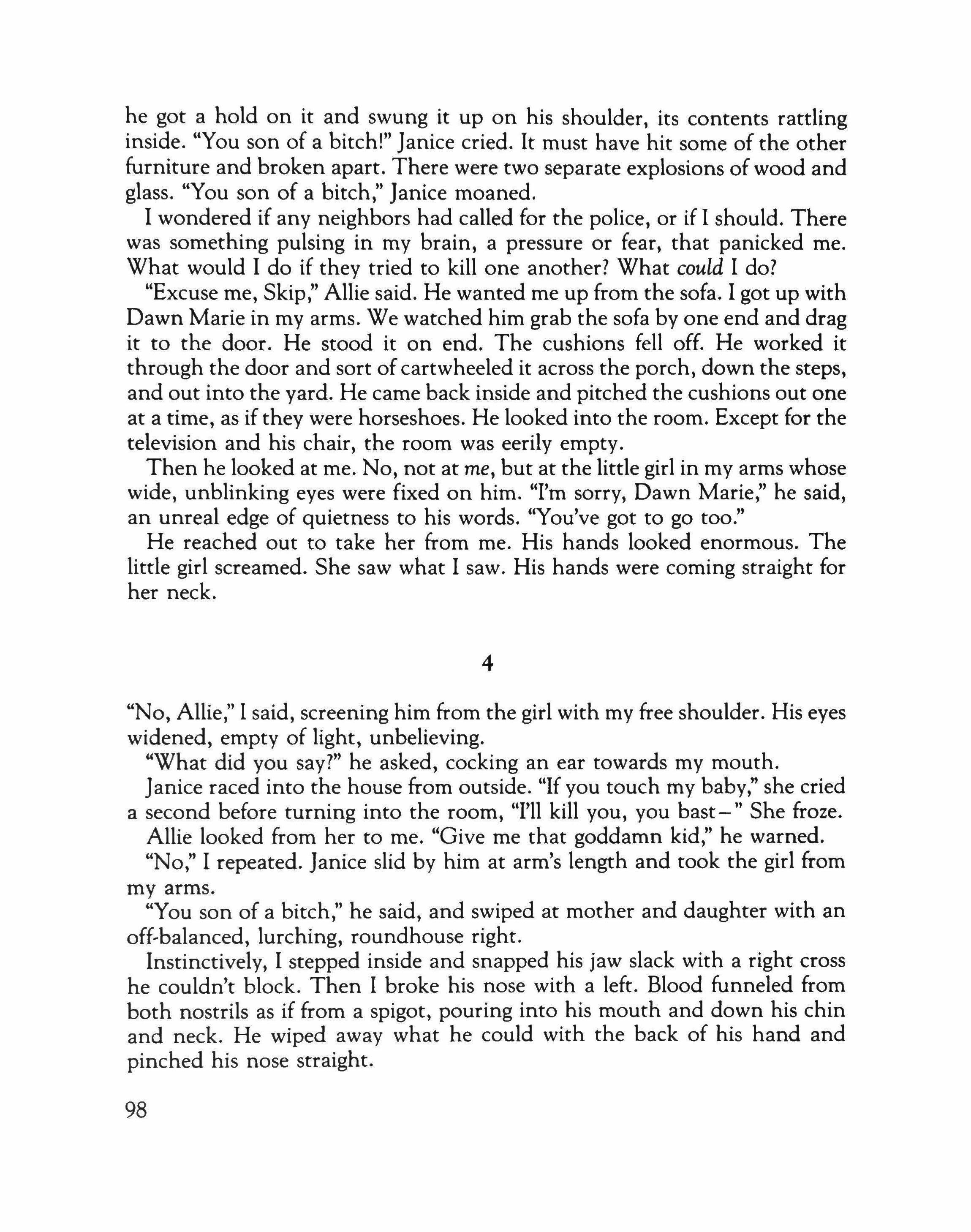
"No, Allie," I said, screening him from the girl with my free shoulder. His eyes widened, empty of light, unbelieving.
"What did you say?" he asked, cocking an ear towards my mouth.
Janice raced into the house from outside. "If you touch my baby," she cried a second before turning into the room, "I'll kill you, you bast -" She froze.
Allie looked from her to me. "Give me that goddamn kid," he warned. "No," I repeated. Janice slid by him at arm's length and took the girl from my arms.
"You son of a bitch," he said, and swiped at mother and daughter with an off-balanced, lurching, roundhouse right.
Instinctively, I stepped inside and snapped his jaw slack with a right cross he couldn't block. Then I broke his nose with a left. Blood funneled from both nostrils as if from a spigot, pouring into his mouth and down his chin and neck. He wiped away what he could with the back of his hand and pinched his nose straight.

"Was that your best?" he said, licking blood off his teeth with a cat,like swipe of his tongue.
janice and child backed into a corner.
"Get out of here," I told her. She hesitated a moment, then bolted through the dining room to the kitchen and out the back. The door-slam reverberated through the empty room.
Allie followed the sound with his eyes. "You're in for a whipping," he said matter-of-factlv, taking a step towards me. I held my ground.
"You killed my birds," I said.
He stopped and smiled a half-smile, as if one side of his face were being lifted by a spasm of involuntary response.
"That's right," he said. "I did. They had more fight in them than you ever had, too, but it was easy. I snapped their necks just like that." And he snapped his fingers to show me how easy it had been. Then he pounced.
He caught me with a good one along the side of the head, tried to muscle me to the floor with those big, powerful arms of his, but I twisted out of his grasp. I hit his nose with three or four piston jabs, and when he fell against me I came up from underneath with a hook to the kidneys that crumpled him like an aluminum can. He curled up on the carpet, bleeding into it, wheezing through his split,lipped mouth and misshapen nose, staring up at me with expressionless eyes.
I think I wanted to cry. I think I wanted to bend over him and hold him in my arms, to wipe his bleeding face with my shirt, to tell him that it would be all right, that it was over now, that the fighting had to stop, that this was the time men had to be strong-strong enough to forgive one another, care for one another, love one another. Instead I stepped over him and went out onto the porch.
janice was at the foot of the porch, standing like the survivor of a wreck. Dawn Marie, impossibly, was asleep in her arms. I stood there looking down at them, unsure of what to say or do.
"Is he all right?" janice asked.
I shrugged. "Are you going back in?" I said.
She glanced wanly at the broken things scattered about her.
"We have no money," she said. "We don't have anything left."
She looked up and retreated half a step, eyes focussed on the space behind me.
Allie blocked the light from the doorway. He struggled to stand to his full height but couldn't. He slumped against the doorframe, comically broken, used up.
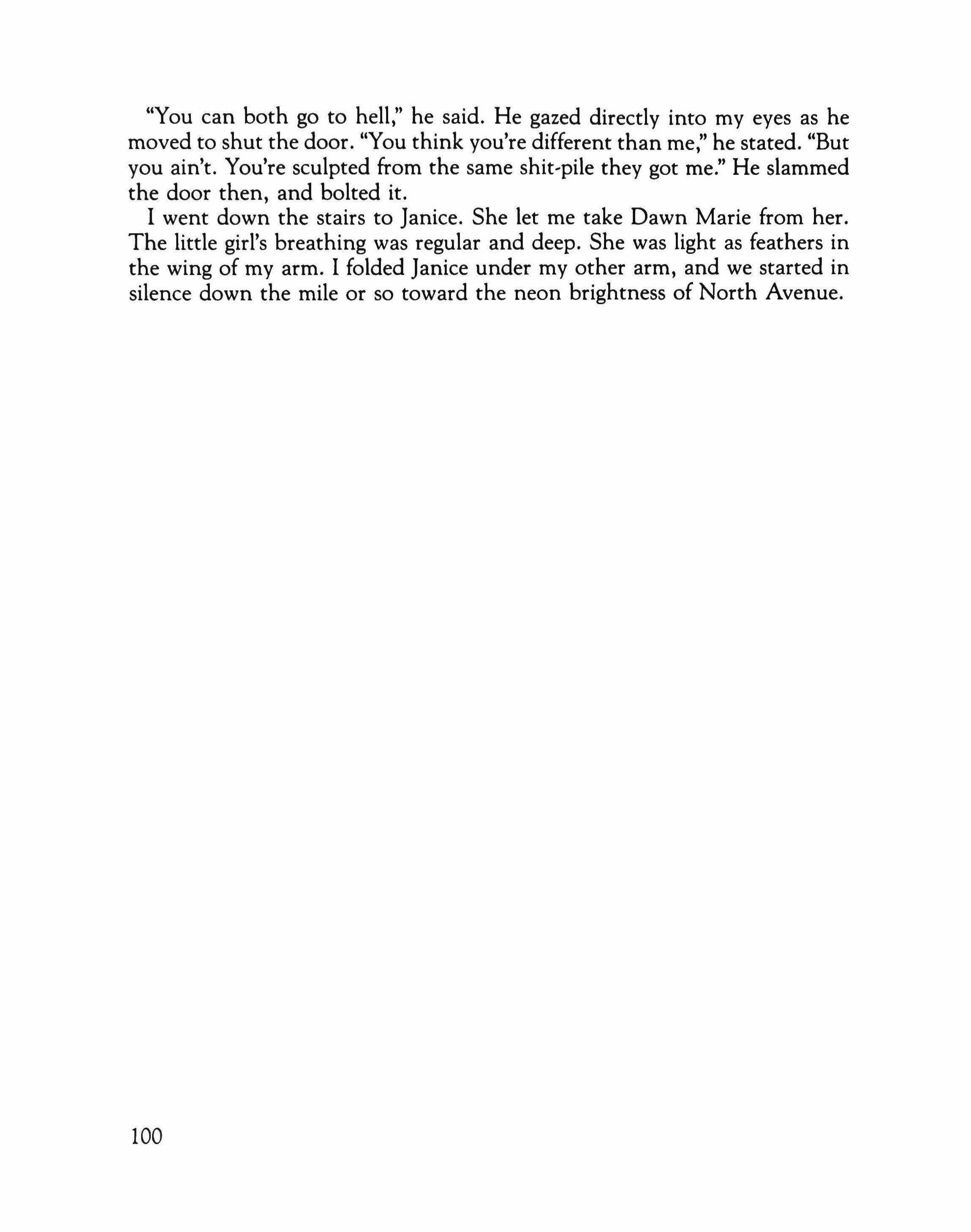
"You can both go to hell," he said. He gazed directly into my eyes as he moved to shut the door. "You think you're different than me," he stated. "But you ain't. You're sculpted from the same shit-pile they got me." He slammed the door then, and bolted it.
I went down the stairs to Janice. She let me take Dawn Marie from her. The little girl's breathing was regular and deep. She was light as feathers in the wing of my arm. I folded Janice under my other arm, and we started in silence down the mile or so toward the neon brightness of North Avenue.
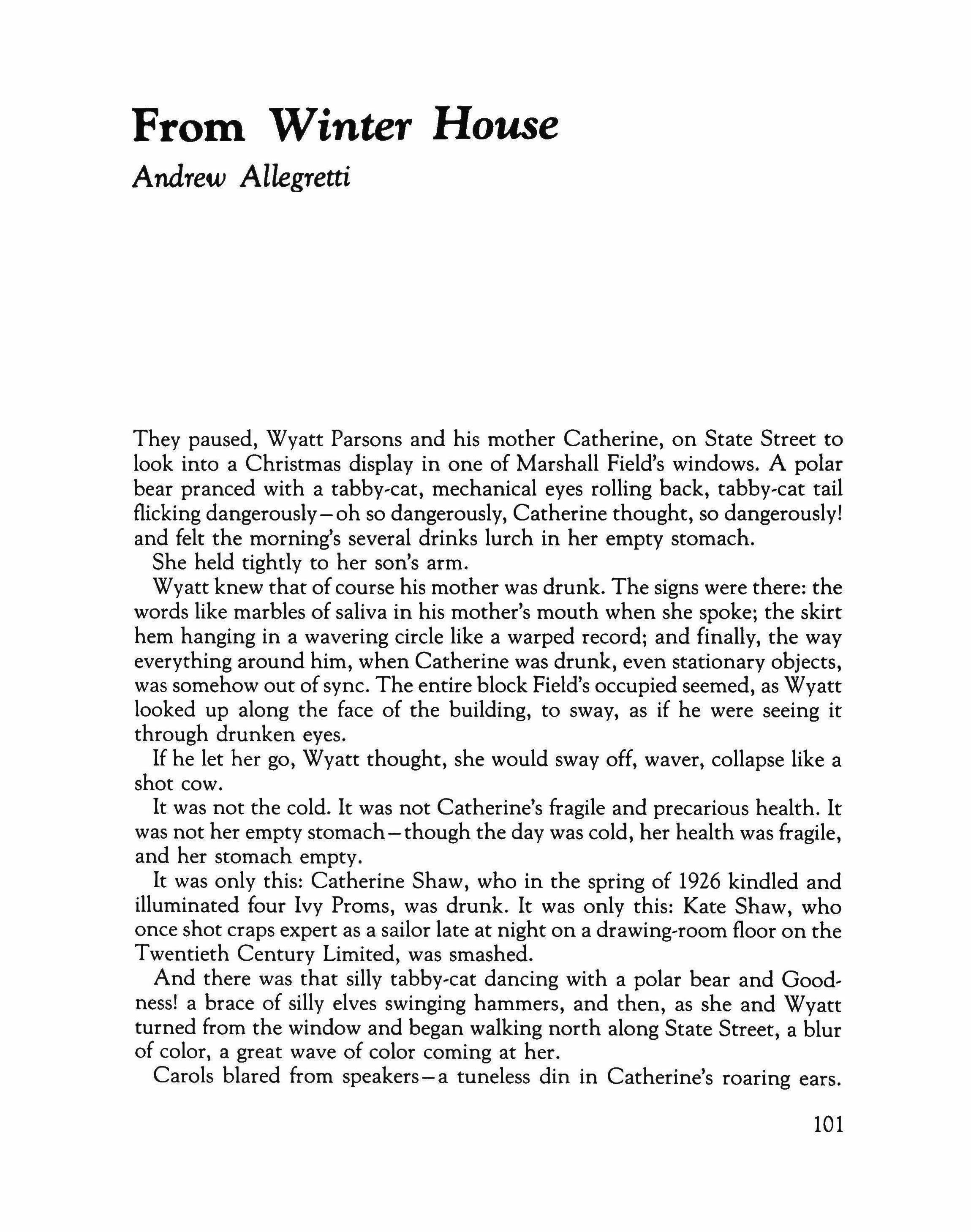
They paused, Wyatt Parsons and his mother Catherine, on State Street to look into a Christmas display in one of Marshall Field's windows. A polar bear pranced with a tabby-cat, mechanical eyes rolling back, tabby-cat tail flicking dangerously-oh so dangerously, Catherine thought, so dangerously! and felt the morning's several drinks lurch in her empty stomach.
She held tightly to her son's arm.
Wyatt knew that of course his mother was drunk. The signs were there: the words like marbles of saliva in his mother's mouth when she spoke; the skirt hem hanging in a wavering circle like a warped record; and finally, the way everything around him, when Catherine was drunk, even stationary objects, was somehow out of sync. The entire block Field's occupied seemed, as Wyatt looked up along the face of the building, to sway, as if he were seeing it through drunken eyes.
If he let her go, Wyatt thought, she would sway off, waver, collapse like a shot cow.
It was not the cold. It was not Catherine's fragile and precarious health. It was not her empty stomach-though the day was cold, her health was fragile, and her stomach empty.
It was only this: Catherine Shaw, who in the spring of 1926 kindled and illuminated four Ivy Proms, was drunk. It was only this: Kate Shaw, who once shot craps expert as a sailor late at night on a drawing-room floor on the Twentieth Century Limited, was smashed.
And there was that silly tabby-cat dancing with a polar bear and Good, ness! a brace of silly elves swinging hammers, and then, as she and Wyatt turned from the window and began walking north along State Street, a blur of color, a great wave of color coming at her.
Carols blared from speakers-a tuneless din in Catherine's roaring ears.
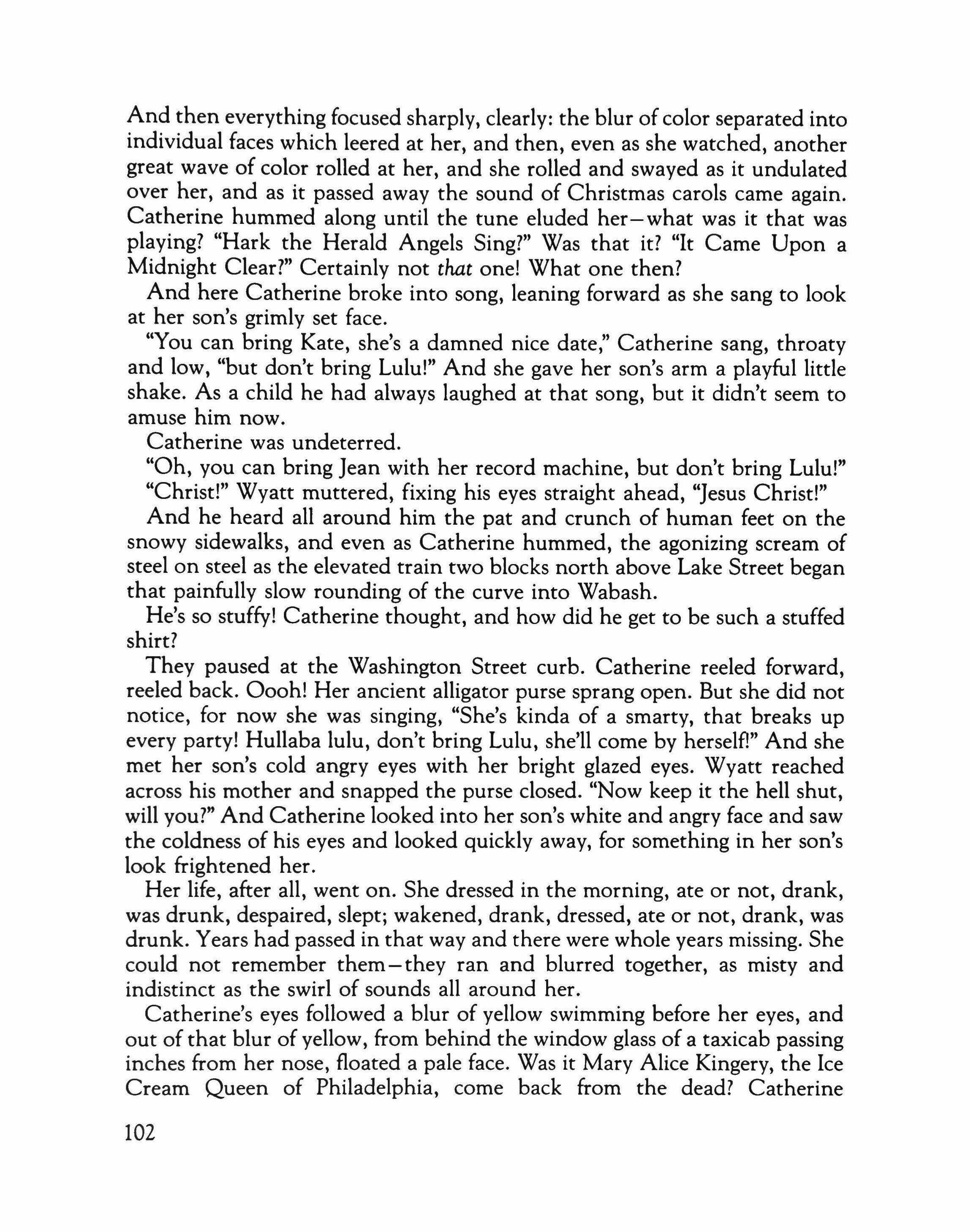
And then everything focused sharply, clearly: the blur of color separated into individual faces which leered at her, and then, even as she watched, another great wave of color rolled at her, and she rolled and swayed as it undulated over her, and as it passed away the sound of Christmas carols came again. Catherine hummed along until the tune eluded her-what was it that was playing? "Hark the Herald Angels Sing?" Was that it? "It Came Upon a Midnight Clear?" Certainly not that one! What one then?
And here Catherine broke into song, leaning forward as she sang to look at her son's grimly set face.
"You can bring Kate, she's a damned nice date," Catherine sang, throaty and low, "but don't bring Lulu!" And she gave her son's arm a playful little shake. As a child he had always laughed at that song, but it didn't seem to amuse him now.
Catherine was undeterred.
"Oh, you can bring Jean with her record machine, but don't bring Lulu!"
"Christ!" Wyatt muttered, fixing his eyes straight ahead, "Jesus Christl"
And he heard all around him the pat and crunch of human feet on the snowy sidewalks, and even as Catherine hummed, the agonizing scream of steel on steel as the elevated train two blocks north above Lake Street began that painfully slow rounding of the curve into Wabash.
He's so stuffy! Catherine thought, and how did he get to be such a stuffed shirt?
They paused at the Washington Street curb. Catherine reeled forward, reeled back. Oooh! Her ancient alligator purse sprang open. But she did not notice, for now she was singing, "She's kinda of a smarty, that breaks up every party! Hullaba lulu, don't bring Lulu, she'll come by herselfl" And she met her son's cold angry eyes with her bright glazed eyes. Wyatt reached across his mother and snapped the purse closed. "Now keep it the hell shut, will you?" And Catherine looked into her son's white and angry face and saw the coldness of his eyes and looked quickly away, for something in her son's look frightened her.
Her life, after all, went on. She dressed in the morning, ate or not, drank, was drunk, despaired, slept; wakened, drank, dressed, ate or not, drank, was drunk. Years had passed in that way and there were whole years missing. She could not remember them-they ran and blurred together, as misty and indistinct as the swirl of sounds all around her.
Catherine's eyes followed a blur of yellow swimming before her eyes, and out of that blur of yellow, from behind the window glass of a taxicab passing inches from her nose, floated a pale face. Was it Mary Alice Kingery, the Ice Cream Queen of Philadelphia, come back from the dead? Catherine
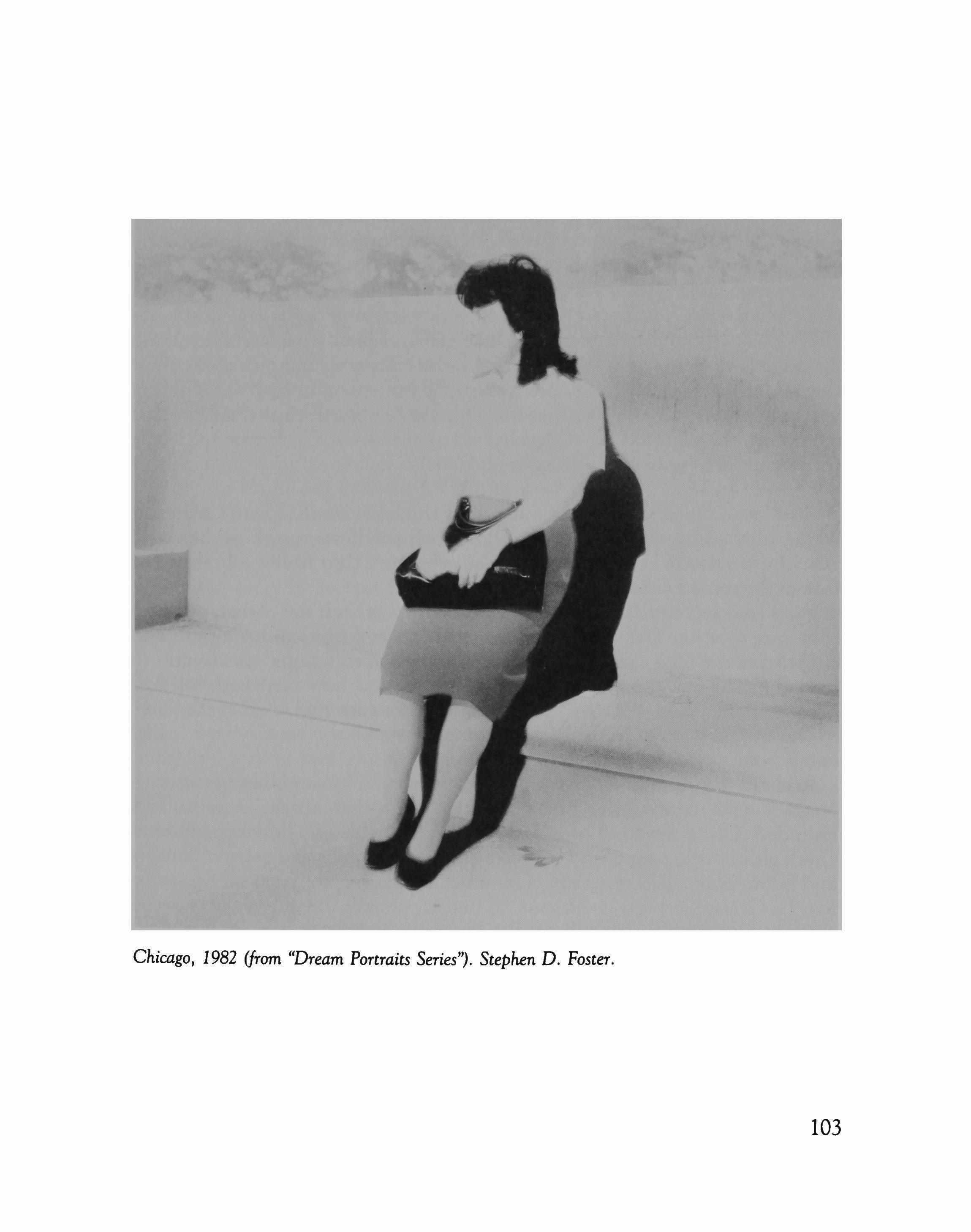
1982 (from
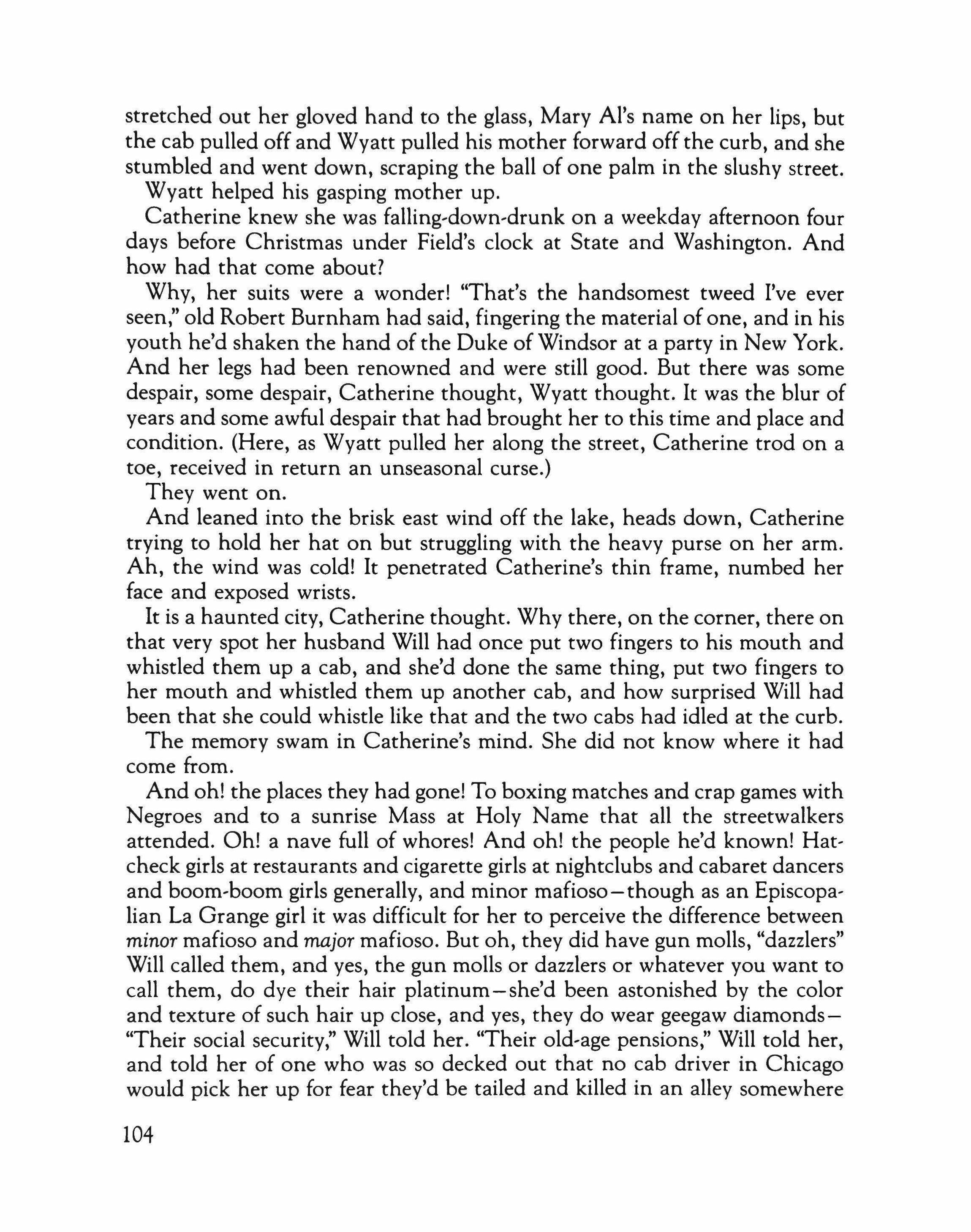
stretched out her gloved hand to the glass, Mary AI's name on her lips, but the cab pulled off and Wyatt pulled his mother forward off the curb, and she stumbled and went down, scraping the ball of one palm in the slushy street.
Wyatt helped his gasping mother up.
Catherine knew she was falling-down-drunk on a weekday afternoon four days before Christmas under Field's clock at State and Washington. And how had that corne about?
Why, her suits were a wonder! "That's the handsomest tweed I've ever seen," old Robert Burnham had said, fingering the material of one, and in his youth he'd shaken the hand of the Duke of Windsor at a party in New York. And her legs had been renowned and were still good. But there was some despair, some despair, Catherine thought, Wyatt thought. It was the blur of years and some awful despair that had brought her to this time and place and condition. (Here, as Wyatt pulled her along the street, Catherine trod on a toe, received in return an unseasonal curse.)
They went on.
And leaned into the brisk east wind off the lake, heads down, Catherine trying to hold her hat on but struggling with the heavy purse on her arm. Ah, the wind was cold! It penetrated Catherine's thin frame, numbed her face and exposed wrists.
It is a haunted city, Catherine thought. Why there, on the corner, there on that very spot her husband Will had once put two fingers to his mouth and whistled them up a cab, and she'd done the same thing, put two fingers to her mouth and whistled them up another cab, and how surprised Will had been that she could whistle like that and the two cabs had idled at the curb.
The memory swam in Catherine's mind. She did not know where it had corne from.
And oh! the places they had gone! To boxing matches and crap games with Negroes and to a sunrise Mass at Holy Name that all the streetwalkers attended. Oh! a nave full of whores! And oh! the people he'd known! Hat, check girls at restaurants and cigarette girls at nightclubs and cabaret dancers and boom-boom girls generally, and minor mafioso-though as an EpiscopaHan La Grange girl it was difficult for her to perceive the difference between minor mafioso and major mafioso. But oh, they did have gun molls, "dazzlers" Will called them, and yes, the gun molls or dazzlers or whatever you want to call them, do dye their hair platinum-she'd been astonished by the color and texture of such hair up close, and yes, they do wear geegaw diamonds"Their social security," Will told her. "Their old-age pensions," Will told her, and told her of one who was so decked out that no cab driver in Chicago would pick her up for fear they'd be tailed and killed in an alley somewhere

for the diamonds. And she'd never known a gangster or a platinum gun moll or a cabaret dancer before she'd known Will. She'd known an Oklahoma oil, boomer girl from Tulsa who came to prep school with eight steamer trunks full of clothes and whose mother had presented Catherine with a list of contents and told her to keep track of Margie's clothes, which hadn't been too difficult, Catherine remembered, because Margie was so tall that her dresses didn't fit anybody, though her hats and gloves and shawls did. And she'd known a vaudeville actor's daughter whose father drove the only lavender Packard on the entire Eastern seaboard. And she'd known a cough-drop heiress, played field hockey with her, but it wasn't the same thing. Why, she'd never gone to a streetwalker's Mass or a boxing match or a floating crap game with Negroes before she'd known Will!
Yes, Catherine thought, slowing her son's hurried pace with the drunken, careful placement of her feet on the slippery, slushy sidewalk, yes there were entire worlds, entire universes she'd no idea of before she'd known Will!
But you could not account for the missing years. Where had they gone? She and Middy Morrow coming back from South America before the War. "Tangerine, Tangerine," the ship's orchestra had played as she and Middy stood at the rail of the liner entering the Port of New Orleans. "Tangerine, toasted in every bar across the Argentine." Why, she'd gained twenty pounds on that cruise. But she'd gotten that off quickly enough-lots of melba toast and a girdle a size too small.
But what of those missing years? And what accounts for this despair? She cannot shed this awful despair the way she'd shed those twenty pounds. And she stopped abruptly to let the emotion pass and Wyatt stopped, too, and they stood silently, mother and son, and Wyatt looked anxiously at his mother's averted face and then she sighed and they started walking again.
But she would not let this despair overwhelm her. No, she would not. And she collected the scattered pieces of herself, and through an act of will assembled them, and sang:
My dear, I've a feeling you are, so near and yet so far!
You appear like a radiant star, first so near and yet so far!
But Wyatt did not hear his mother whispering the song lyrics, and as the elevated train rumbled ahead and above them, he had his own thoughts. Yes, there were missing years for him, too. There was so much he could not remember. It seemed to him he'd gone to sleep exhausted from some upheaval when he was eight or nine and had not wakened until he was fourteen and angry and still exhausted. And now he was twenty and he did not know what he had been doing while he was asleep and he did not know
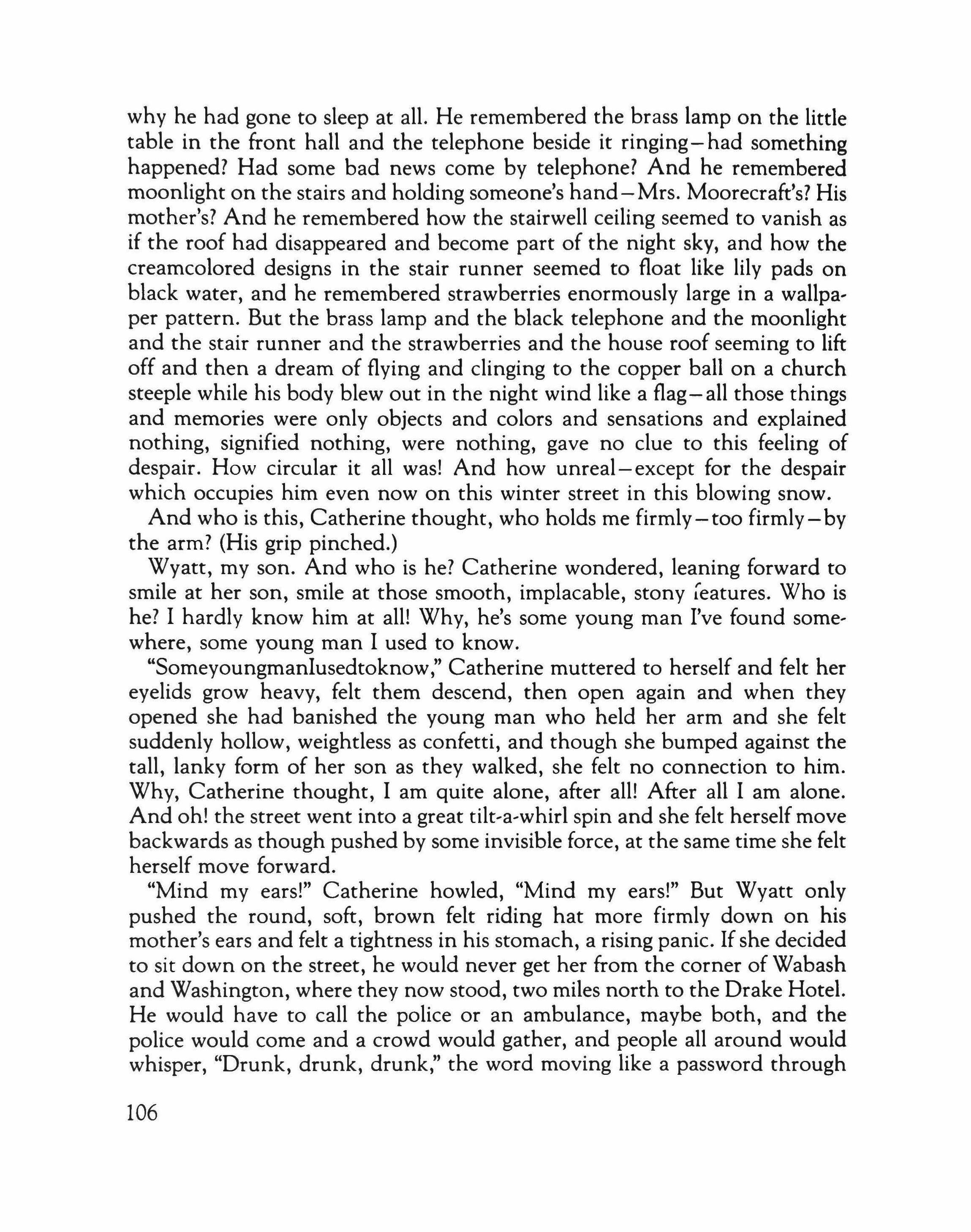
why he had gone to sleep at all. He remembered the brass lamp on the little table in the front hall and the telephone beside it ringing-had something happened? Had some bad news come by telephone? And he remembered moonlight on the stairs and holding someone's hand - Mrs. Moorecraft's? His mother's? And he remembered how the stairwell ceiling seemed to vanish as if the roof had disappeared and become part of the night sky, and how the creamcolored designs in the stair runner seemed to float like lily pads on black water, and he remembered strawberries enormously large in a wallpaper pattern. But the brass lamp and the black telephone and the moonlight and the stair runner and the strawberries and the house roof seeming to lift off and then a dream of flying and clinging to the copper ball on a church steeple while his body blew out in the night wind like a flag-all those things and memories were only objects and colors and sensations and explained nothing, signified nothing, were nothing, gave no clue to this feeling of despair. How circular it all was! And how unreal-except for the despair which occupies him even now on this winter street in this blowing snow.
And who is this, Catherine thought, who holds me firmly-too firmly-by the arm? (His grip pinched.)
Wyatt, my son. And who is he? Catherine wondered, leaning forward to smile at her son, smile at those smooth, implacable, stony Ieatures. Who is he? I hardly know him at all! Why, he's some young man I've found some' where, some young man I used to know.
"Someyoungmanlusedtoknow," Catherine muttered to herself and felt her eyelids grow heavy, felt them descend, then open again and when they opened she had banished the young man who held her arm and she felt suddenly hollow, weightless as confetti, and though she bumped against the tall, lanky form of her son as they walked, she felt no connection to him. Why, Catherine thought, I am quite alone, after all! After all I am alone. And oh! the street went into a great tilt-a-whirl spin and she felt herself move backwards as though pushed by some invisible force, at the same time she felt herself move forward.
"Mind my ears!" Catherine howled, "Mind my ears!" But Wyatt only pushed the round, soft, brown felt riding hat more firmly down on his mother's ears and felt a tightness in his stomach, a rising panic. If she decided to sit down on the street, he would never get her from the corner of Wabash and Washington, where they now stood, two miles north to the Drake Hotel. He would have to call the police or an ambulance, maybe both, and the police would come and a crowd would gather, and people all around would whisper, "Drunk, drunk, drunk," the word moving like a password through
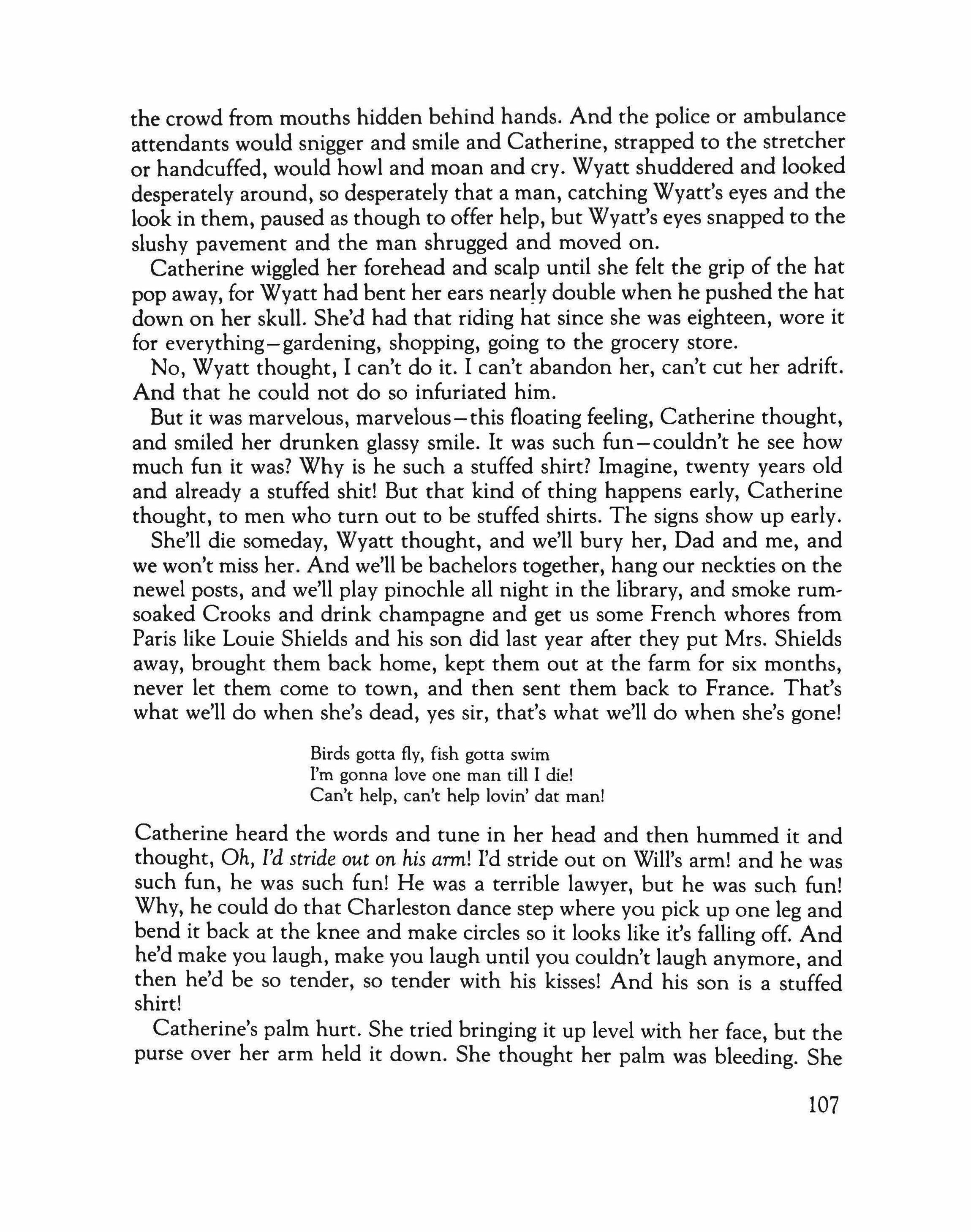
the crowd from mouths hidden behind hands. And the police or ambulance attendants would snigger and smile and Catherine, strapped to the stretcher or handcuffed, would howl and moan and cry. Wyatt shuddered and looked desperately around, so desperately that a man, catching Wyatt's eyes and the look in them, paused as though to offer help, but Wyatt's eyes snapped to the slushy pavement and the man shrugged and moved on.
Catherine wiggled her forehead and scalp until she felt the grip of the hat pop away, for Wyatt had bent her ears nearly double when he pushed the hat down on her skull. She'd had that riding hat since she was eighteen, wore it for everything - gardening, shopping, going to the grocery store.
No, Wyatt thought, I can't do it. I can't abandon her, can't cut her adrift. And that he could not do so infuriated him.
But it was marvelous, marvelous-this floating feeling, Catherine thought, and smiled her drunken glassy smile. It was such fun - couldn't he see how much fun it was? Why is he such a stuffed shirt? Imagine, twenty years old and already a stuffed shit! But that kind of thing happens early, Catherine thought, to men who turn out to be stuffed shirts. The signs show up early.
She'll die someday, Wyatt thought, and we'll bury her, Dad and me, and we won't miss her. And we'll be bachelors together, hang our neckties on the newel posts, and we'll play pinochle all night in the library, and smoke rumsoaked Crooks and drink champagne and get us some French whores from Paris like Louie Shields and his son did last year after they put Mrs. Shields away, brought them back home, kept them out at the farm for six months, never let them come to town, and then sent them back to France. That's what we'll do when she's dead, yes sir, that's what we'll do when she's gone!
Birds gotta fly, fish gotta swim
I'm gonna love one man till I die!
Can't help, can't help lovin' dat man!
Catherine heard the words and tune in her head and then hummed it and thought, Oh, I'd stride out on his arm! I'd stride out on Will's arm! and he was such fun, he was such fun! He was a terrible lawyer, but he was such fun! Why, he could do that Charleston dance step where you pick up one leg and bend it back at the knee and make circles so it looks like it's falling off. And he'd make you laugh, make you laugh until you couldn't laugh anymore, and then he'd be so tender, so tender with his kisses! And his son is a stuffed shirt!
Catherine's palm hurt. She tried bringing it up level with her face, but the purse over her arm held it down. She thought her palm was bleeding. She
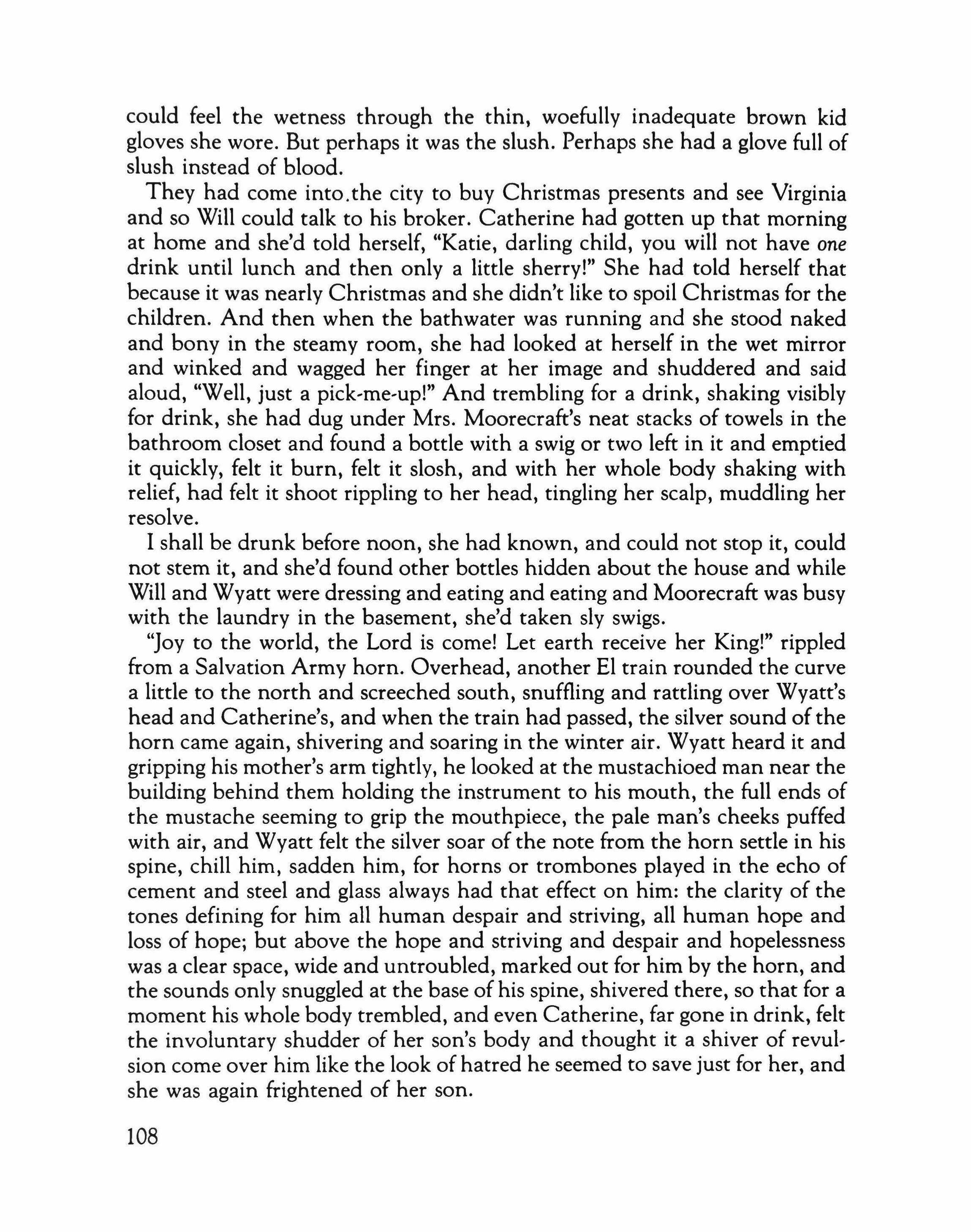
could feel the wetness through the thin, woefully inadequate brown kid gloves she wore. But perhaps it was the slush. Perhaps she had a glove full of slush instead of blood.
They had come into.the city to buy Christmas presents and see Virginia and so Will could talk to his broker. Catherine had gotten up that morning at home and she'd told herself, "Katie, darling child, you will not have one drink until lunch and then only a little sherry!" She had told herself that because it was nearly Christmas and she didn't like to spoil Christmas for the children. And then when the bathwater was running and she stood naked and bony in the steamy room, she had looked at herself in the wet mirror and winked and wagged her finger at her image and shuddered and said aloud, "Well, just a pick-me-up!" And trembling for a drink, shaking visibly for drink, she had dug under Mrs. Moorecraft's neat stacks of towels in the bathroom closet and found a bottle with a swig or two left in it and emptied it quickly, felt it burn, felt it slosh, and with her whole body shaking with relief, had felt it shoot rippling to her head, tingling her scalp, muddling her resolve.
I shall be drunk before noon, she had known, and could not stop it, could not stem it, and she'd found other bottles hidden about the house and while Will and Wyatt were dressing and eating and eating and Moorecraft was busy with the laundry in the basement, she'd taken sly swigs.
"Joy to the world, the Lord is come! Let earth receive her King!" rippled from a Salvation Army horn. Overhead, another El train rounded the curve a little to the north and screeched south, snuffling and rattling over Wyatt's head and Catherine's, and when the train had passed, the silver sound ofthe horn came again, shivering and soaring in the winter air. Wyatt heard it and gripping his mother's arm tightly, he looked at the mustachioed man near the building behind them holding the instrument to his mouth, the full ends of the mustache seeming to grip the mouthpiece, the pale man's cheeks puffed with air, and Wyatt felt the silver soar of the note from the horn settle in his spine, chill him, sadden him, for horns or trombones played in the echo of cement and steel and glass always had that effect on him: the clarity of the tones defining for him all human despair and striving, all human hope and loss of hope; but above the hope and striving and despair and hopelessness was a clear space, wide and untroubled, marked out for him by the horn, and the sounds only snuggled at the base of his spine, shivered there, so that for a moment his whole body trembled, and even Catherine, far gone in drink, felt the involuntary shudder of her son's body and thought it a shiver of revulsion come over him like the look of hatred he seemed to save just for her, and she was again frightened of her son.

Hopeless, Wyatt thought, how hopeless it all is! for he had known that morning at home even as he waited bundled against the cold at the foot of the front porch steps that Catherine would be drunk-or nearly so. And stamping his feet and dancing from one leg to another, while he looked out across the lawn to the woods facing the house and the lane going through the trees to the blacktop, he had felt his spine tingle when he'd heard the catch of the front door opening and then his mother's bird-weight snapping the frozen boards of the porch, and his shoulders had hunched involuntarily against that sound, and he had stared off at the flat snow before him, hearing behind him his mother's careful descent of the long flight of wide wooden steps, how carefully she descended with long pauses between the creak of each step as though she stood considering the enormous task before moving again, and then her voice had come, sharply ordering her son to help her, and he had not responded right away, but only kept his sullen back to her as he stared before him at the snow until the sun's reflection made him see green squiggles across his retina, and only then had he dropped his shoulders from the hunched position and turned and giggled at the sight of her clinging to the stair rail with both hands as though to the rail of a sinking ship, hat askew, hair straggling down in wisps from beneath that absurd childish hatthat enormous relic of an alligator purse swinging on her arm, and the ancient alligator shoes which would flop on her feet as she walked. And there she stood, marooned between the porch and the drive on the high treacherous steps which Wyatt had not swept clear of snow, with the entire vertical soar and bulk of the house rising above her, dwarfing her, making her look impossibly small and helpless, and he had gone up to her, feeling her fear of the slippery steps as he gripped her arm, and she heaved herself down sideways one step at a time, holding the rail with both hands, and she trembled inside the heavy tweed of her coat-the Horse Blanket, his father, in better times, had named it.
"You're drunk!' Wyatt had hissed into her ear as he helped her descend, and she had not looked at him, but had winced and shaken her head as though she could not deal with her son's insults and the treacherous steps at the same time.
"Christ! You're drunk already!"
And feeling her pathetic bird-weight on his arm nearly six hours later, he wanted to fling her around his head by one arm and let go of her and watch her soar over the EI tracks and smash into a fifth-floor window of a building across the street. But he could not do that either. Somehow he had to get her to the Drake. It did not matter what happened once he got her there, but only that he did.
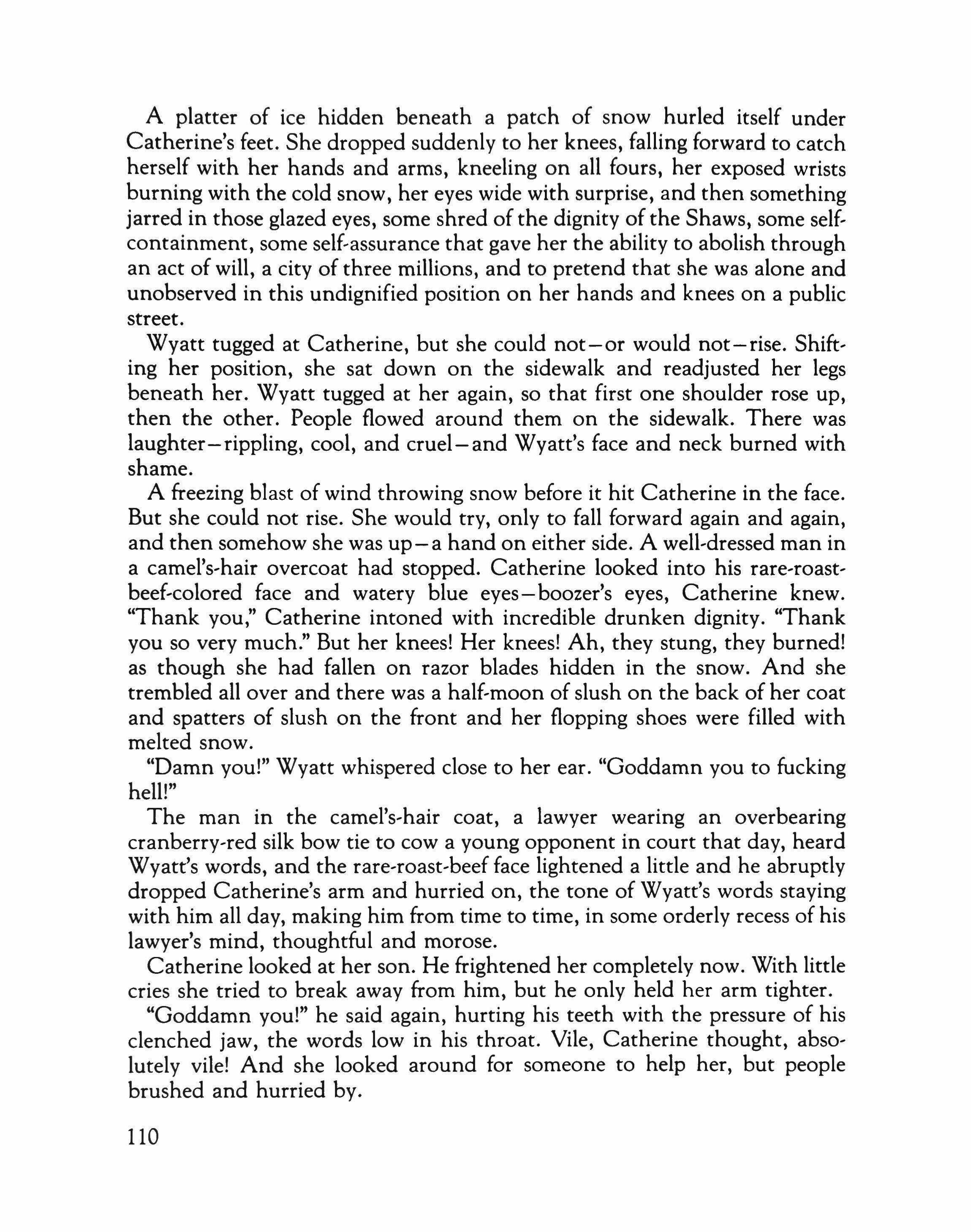
A platter of ice hidden beneath a patch of snow hurled itself under Catherine's feet. She dropped suddenly to her knees, falling forward to catch herself with her hands and arms, kneeling on all fours, her exposed wrists burning with the cold snow, her eyes wide with surprise, and then something jarred in those glazed eyes, some shred of the dignity of the Shaws, some self, containment, some self,assurance that gave her the ability to abolish through an act of will, a city of three millions, and to pretend that she was alone and unobserved in this undignified position on her hands and knees on a public street.
Wyatt tugged at Catherine, but she could not-or would not-rise. Shift, ing her position, she sat down on the sidewalk and readjusted her legs beneath her. Wyatt tugged at her again, so that first one shoulder rose up, then the other. People flowed around them on the sidewalk. There was laughter-rippling, cool, and cruel-and Wyatt's face and neck burned with shame.
A freezing blast of wind throwing snow before it hit Catherine in the face. But she could not rise. She would try, only to fall forward again and again, and then somehow she was up-a hand on either side. A well-dressed man in a camel's-hair overcoat had stopped. Catherine looked into his rare-roastbeef-colored face and watery blue eyes-boozer's eyes, Catherine knew. "Thank you," Catherine intoned with incredible drunken dignity. "Thank you so very much." But her knees! Her knees! Ah, they stung, they burned! as though she had fallen on razor blades hidden in the snow. And she trembled all over and there was a half-moon of slush on the back of her coat and spatters of slush on the front and her flopping shoes were filled with melted snow.
"Damn you!" Wyatt whispered close to her ear. "Goddamn you to fucking hell!"
The man in the camel's-hair coat, a lawyer wearing an overbearing cranberry-red silk bow tie to cow a young opponent in court that day, heard Wyatt's words, and the rare-roast-beef face lightened a little and he abruptly dropped Catherine's arm and hurried on, the tone of Wyatt's words staying with him all day, making him from time to time, in some orderly recess of his lawyer's mind, thoughtful and morose.
Catherine looked at her son. He frightened her completely now. With little cries she tried to break away from him, but he only held her arm tighter.
"Goddamn you!" he said again, hurting his teeth with the pressure of his clenched jaw, the words low in his throat. Vile, Catherine thought, absolutely vile! And she looked around for someone to help her, but people brushed and hurried by.
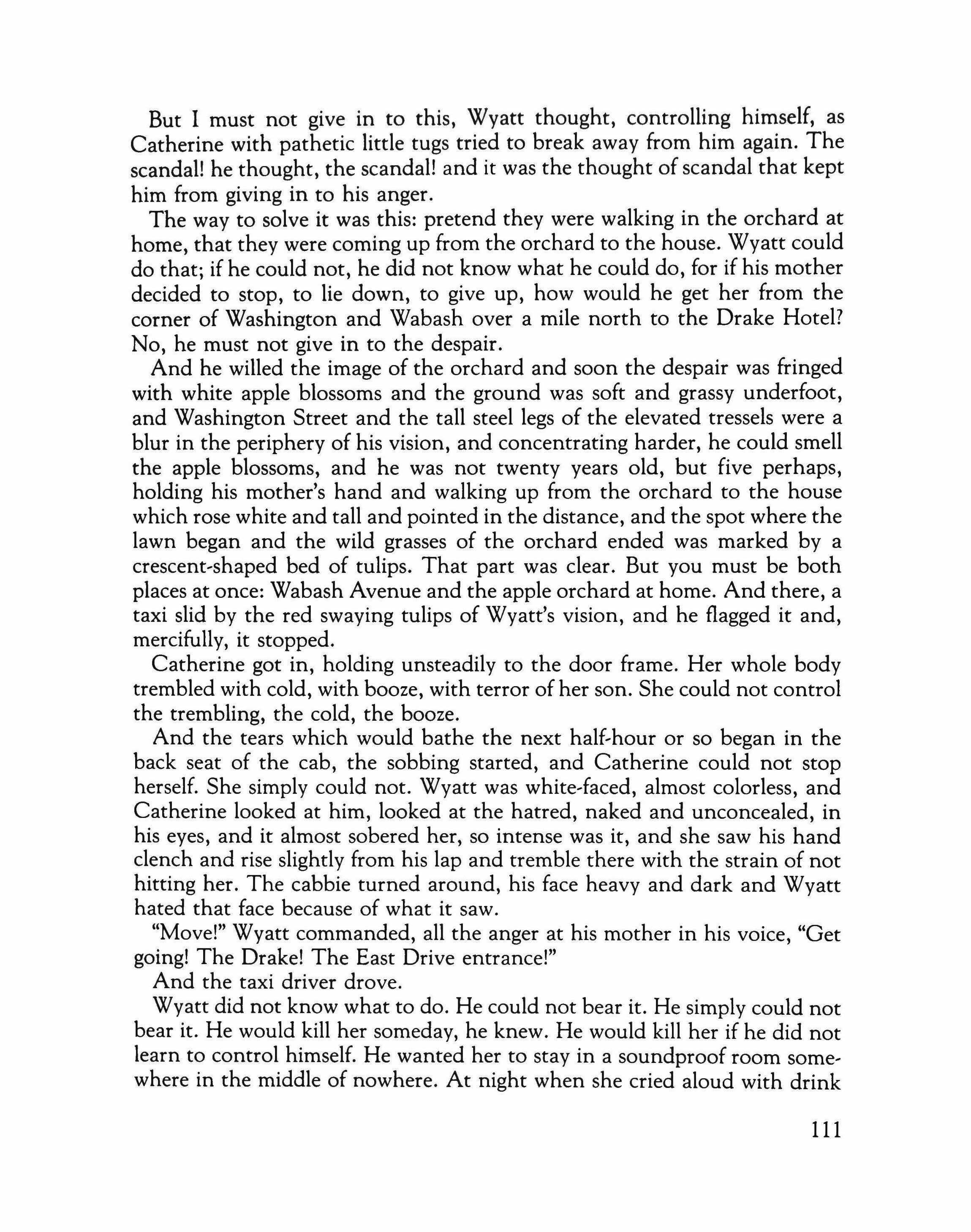
But I must not give in to this, Wyatt thought, controlling himself, as Catherine with pathetic little tugs tried to break away from him again. The scandal! he thought, the scandal! and it was the thought of scandal that kept him from giving in to his anger.
The way to solve it was this: pretend they were walking in the orchard at home, that they were coming up from the orchard to the house. Wyatt could do that; if he could not, he did not know what he could do, for if his mother decided to stop, to lie down, to give up, how would he get her from the corner of Washington and Wabash over a mile north to the Drake Hotel? No, he must not give in to the despair.
And he willed the image of the orchard and soon the despair was fringed with white apple blossoms and the ground was soft and grassy underfoot, and Washington Street and the tall steel legs of the elevated tressels were a blur in the periphery of his vision, and concentrating harder, he could smell the apple blossoms, and he was not twenty years old, but five perhaps, holding his mother's hand and walking up from the orchard to the house which rose white and tall and pointed in the distance, and the spot where the lawn began and the wild grasses of the orchard ended was marked by a crescent-shaped bed of tulips. That part was clear. But you must be both places at once: Wabash Avenue and the apple orchard at home. And there, a taxi slid by the red swaying tulips of Wyatt's vision, and he flagged it and, mercifully, it stopped.
Catherine got in, holding unsteadily to the door frame. Her whole body trembled with cold, with booze, with terror of her son. She could not control the trembling, the cold, the booze.
And the tears which would bathe the next half,hour or so began in the back seat of the cab, the sobbing started, and Catherine could not stop herself. She simply could not. Wyatt was white-faced, almost colorless, and Catherine looked at him, looked at the hatred, naked and unconcealed, in his eyes, and it almost sobered her, so intense was it, and she saw his hand clench and rise slightly from his lap and tremble there with the strain of not hitting her. The cabbie turned around, his face heavy and dark and Wyatt hated that face because of what it saw.
"Move!" Wyatt commanded, all the anger at his mother in his voice, "Get going! The Drake! The East Drive entrance!"
And the taxi driver drove.
Wyatt did not know what to do. He could not bear it. He simply could not bear it. He would kill her someday, he knew. He would kill her if he did not learn to control himself. He wanted her to stay in a soundproof room some, where in the middle of nowhere. At night when she cried aloud with drink
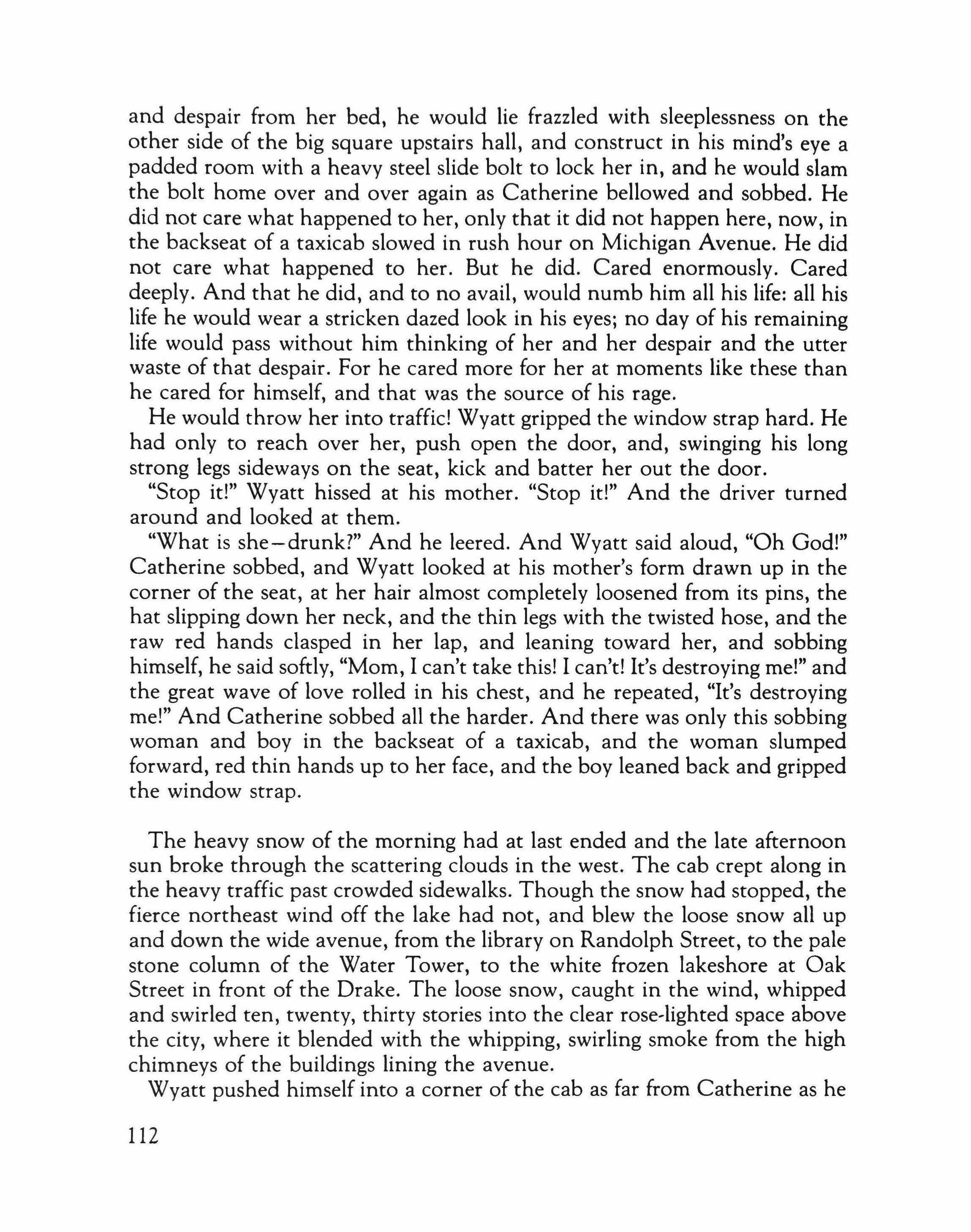
and despair from her bed, he would lie frazzled with sleeplessness on the other side of the big square upstairs hall, and construct in his mind's eye a padded room with a heavy steel slide bolt to lock her in, and he would slam the bolt home over and over again as Catherine bellowed and sobbed. He did not care what happened to her, only that it did not happen here, now, in the backseat of a taxicab slowed in rush hour on Michigan Avenue. He did not care what happened to her. But he did. Cared enormously. Cared deeply. And that he did, and to no avail, would numb him all his life: all his life he would wear a stricken dazed look in his eyes; no day of his remaining life would pass without him thinking of her and her despair and the utter waste of that despair. For he cared more for her at moments like these than he cared for himself, and that was the source of his rage.
He would throw her into traffic! Wyatt gripped the window strap hard. He had only to reach over her, push open the door, and, swinging his long strong legs sideways on the seat, kick and batter her out the door.
"Stop it!" Wyatt hissed at his mother. "Stop it!" And the driver turned around and looked at them.
"What is she-drunk?" And he leered. And Wyatt said aloud, "Oh God!" Catherine sobbed, and Wyatt looked at his mother's form drawn up in the corner of the seat, at her hair almost completely loosened from its pins, the hat slipping down her neck, and the thin legs with the twisted hose, and the raw red hands clasped in her lap, and leaning toward her, and sobbing himself, he said softly, "Mom, I can't take this! I can't! It's destroying me!" and the great wave of love rolled in his chest, and he repeated, "It's destroying me!" And Catherine sobbed all the harder. And there was only this sobbing woman and boy in the backseat of a taxicab, and the woman slumped forward, red thin hands up to her face, and the boy leaned back and gripped the window strap.
The heavy snow of the morning had at last ended and the late afternoon sun broke through the scattering clouds in the west. The cab crept along in the heavy traffic past crowded sidewalks. Though the snow had stopped, the fierce northeast wind off the lake had not, and blew the loose snow all up and down the wide avenue, from the library on Randolph Street, to the pale stone column of the Water Tower, to the white frozen lakeshore at Oak Street in front of the Drake. The loose snow, caught in the wind, whipped and swirled ten, twenty, thirty stories into the clear rose-lighted space above the city, where it blended with the whipping, swirling smoke from the high chimneys of the buildings lining the avenue.
Wyatt pushed himself into a corner of the cab as far from Catherine as he

could get. He covered his face with his hands, those fine narrow hands which were like his mother's hands, too, and they sat identically on the backseat of the cab, mother and son, and the fine, sad, waning light lighted them at east' west streets, brightened for a moment the pale, drawn profiles. And Catherine's sobs gradually stilled.
Why couldn't his father be here? Wyatt thought. Why had this become his responsibility? It should not be his responsibility! All this should have been Will's responsibility, should be his father's to bear, his father's to set right. And there was so much to set right, but you could never set it right, Wyatt knew, for it wobbled now on its axis, this great green-blue globe oftheir lives, and it could not ever be set right. Wyatt looked at his mother, who was turned away from him, looked at the hands covering her face, and the trembling mouth visible in profile behind her hands, and looked beyond her at the twinkling tiny lights of the trees above the crowded sidewalk. How often had he seen that mouth wet with tears? Seen the tears blend with the trembling mouth? A sharp memory of the smell and texture of a linen blouse warm with his mother's body heat and the sweet smell of her Lily of the Valley perfume, and her soft neck against his soft neck, and her softer breasts against his stomach as she held him, came to Wyatt now, and his eyes filled with the sight of a green plush chair-back into which he must have been staring listening to her cry. Perhaps that was the first time he remembered her sobbing.
He knew the giddy fun of sharing a piano bench while she sang and set the great black, enormously long, concert grand hopping with a lively tune; he knew the wonder, the delicacy of a blue-and-white Chinese bowl filled with the trumpet shapes of yellow and white iris because of her; he knew right from wrong because of her, knew the great sin of the conscious infliction of injury because of her; knew that if there was hell and hellfire then the lick of its flames is reserved for the great sins against faith, hope, and charity. She had taught him that, had showed him that. Why, he had seen her grasp a puppy wedged sideways in the birth canal of a Collie bitch and save both bitch and puppy; he had seen her straddle and lift a horse's foreleg and with a pliers extract the stone from beneath the shoe. He had seen all his life, since first he could see and reason, her capable, competent hands performing some task, how she blushed with pleasure and the joy of life, lighted and beamed with the pleasure of life.
Yet you could not trust her, not for one second. She would start out a day perfectly cheerful, perfectly in control, perfectly at ease, and then she would jump the track and be drunk before noon. Wyatt had no idea what made her jump the track, he knew only that she always did.
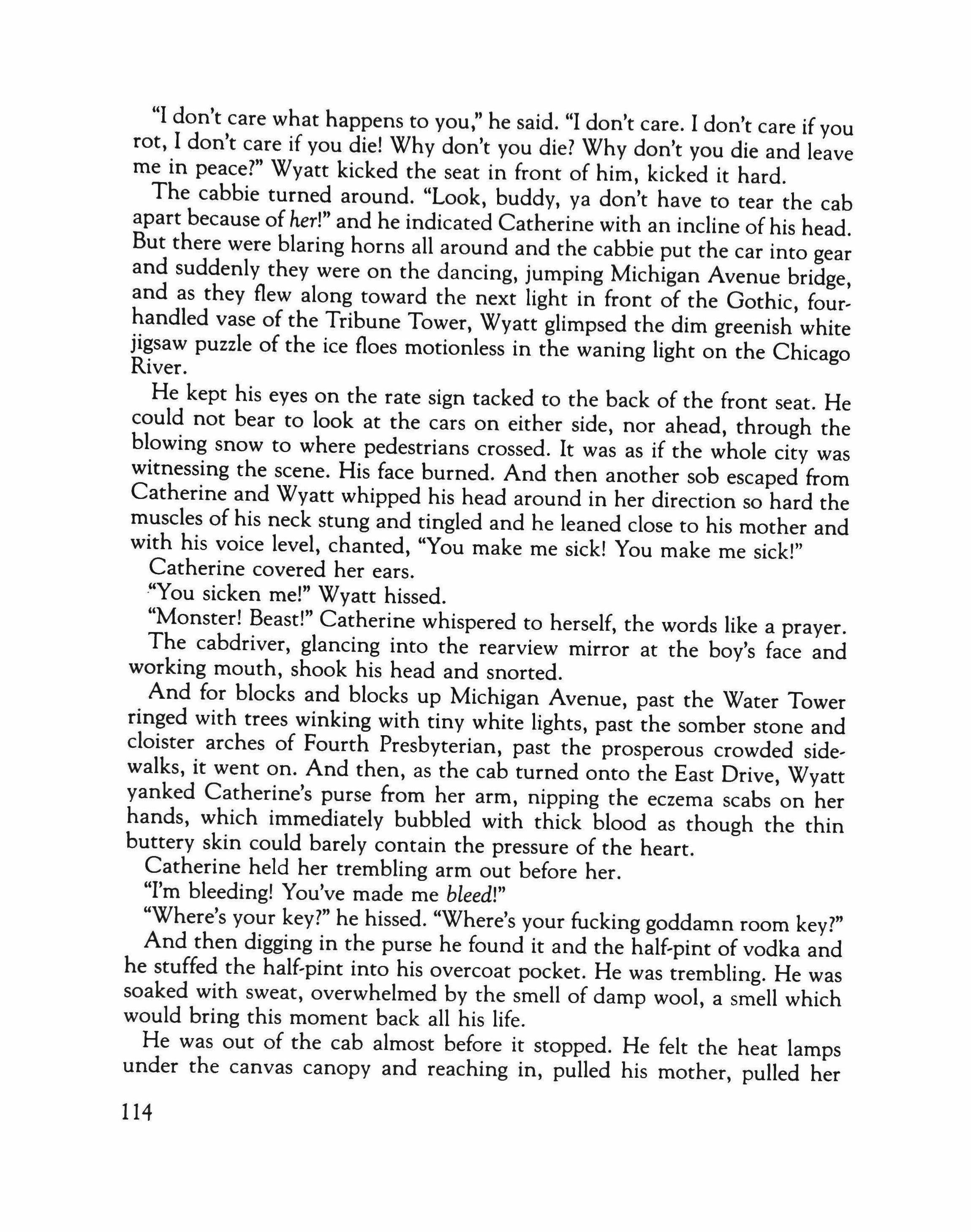
"I don't care what happens to you," he said. "I don't care. I don't care if you rot, I don't care if you die! Why don't you die? Why don't you die and leave me in peace?" Wyatt kicked the seat in front of him, kicked it hard.
The cabbie turned around. "Look, buddy, ya don't have to tear the cab apart because of her!" and he indicated Catherine with an incline of his head. But there were blaring horns all around and the cabbie put the car into gear and suddenly they were on the dancing, jumping Michigan Avenue bridge, and as they flew along toward the next light in front of the Gothic, four, handled vase of the Tribune Tower, Wyatt glimpsed the dim greenish white jigsaw puzzle of the ice floes motionless in the waning light on the Chicago River.
He kept his eyes on the rate sign tacked to the back of the front seat. He could not bear to look at the cars on either side, nor ahead, through the blowing snow to where pedestrians crossed. It was as if the whole city was witnessing the scene. His face burned. And then another sob escaped from Catherine and Wyatt whipped his head around in her direction so hard the muscles of his neck stung and tingled and he leaned close to his mother and with his voice level, chanted, "You make me sick! You make me sick!"
Catherine covered her ears.
·"You sicken me!" Wyatt hissed.
"Monster! Beast!" Catherine whispered to herself, the words like a prayer.
The cabdriver, glancing into the rearview mirror at the boy's face and working mouth, shook his head and snorted.
And for blocks and blocks up Michigan Avenue, past the Water Tower ringed with trees winking with tiny white lights, past the somber stone and cloister arches of Fourth Presbyterian, past the prosperous crowded side, walks, it went on. And then, as the cab turned onto the East Drive, Wyatt yanked Catherine's purse from her arm, nipping the eczema scabs on her hands, which immediately bubbled with thick blood as though the thin buttery skin could barely contain the pressure of the heart.
Catherine held her trembling arm out before her.
"I'm bleeding! You've made me bleed!"
"Where's your key?" he hissed. "Where's your fucking goddamn room key?"
And then digging in the purse he found it and the half-pint of vodka and he stuffed the half-pint into his overcoat pocket. He was trembling. He was soaked with sweat, overwhelmed by the smell of damp wool, a smell which would bring this moment back all his life.
He was out of the cab almost before it stopped. He felt the heat lamps under the canvas canopy and reaching in, pulled his mother, pulled her
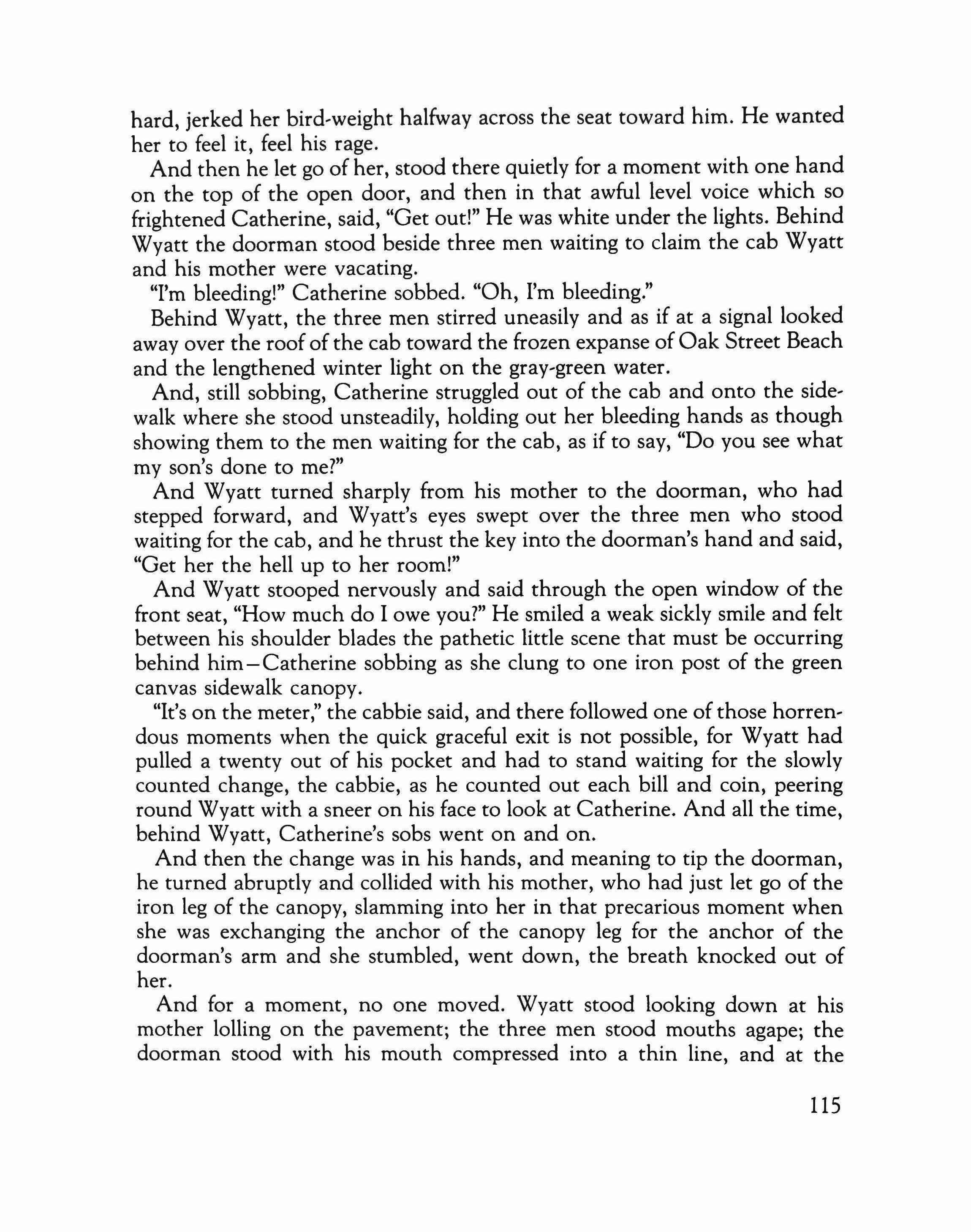
hard, jerked her bird-weight halfway across the seat toward him. He wanted her to feel it, feel his rage.
And then he let go of her, stood there quietly for a moment with one hand on the top of the open door, and then in that awful level voice which so frightened Catherine, said, "Get out!" He was white under the lights. Behind Wyatt the doorman stood beside three men waiting to claim the cab Wyatt and his mother were vacating.
"I'm bleeding!" Catherine sobbed. "Oh, I'm bleeding."
Behind Wyatt, the three men stirred uneasily and as if at a signal looked away over the roof of the cab toward the frozen expanse of Oak Street Beach and the lengthened winter light on the gray-green water.
And, still sobbing, Catherine struggled out of the cab and onto the sidewalk where she stood unsteadily, holding out her bleeding hands as though showing them to the men waiting for the cab, as if to say, "Do you see what my son's done to me?"
And Wyatt turned sharply from his mother to the doorman, who had stepped forward, and Wyatt's eyes swept over the three men who stood waiting for the cab, and he thrust the key into the doorman's hand and said, "Get her the hell up to her room!"
And Wyatt stooped nervously and said through the open window of the front seat, "How much do lowe you?" He smiled a weak sickly smile and felt between his shoulder blades the pathetic little scene that must be occurring behind him - Catherine sobbing as she clung to one iron post of the green canvas sidewalk canopy.
"It's on the meter," the cabbie said, and there followed one of those horrendous moments when the quick graceful exit is not possible, for Wyatt had pulled a twenty out of his pocket and had to stand waiting for the slowly counted change, the cabbie, as he counted out each bill and coin, peering round Wyatt with a sneer on his face to look at Catherine. And all the time, behind Wyatt, Catherine's sobs went on and on.
And then the change was in his hands, and meaning to tip the doorman, he turned abruptly and collided with his mother, who had just let go of the iron leg of the canopy, slamming into her in that precarious moment when she was exchanging the anchor of the canopy leg for the anchor of the doorman's arm and she stumbled, went down, the breath knocked out of her.
And for a moment, no one moved. Wyatt stood looking down at his mother lolling on the pavement; the three men stood mouths agape; the doorman stood with his mouth compressed into a thin line, and at the
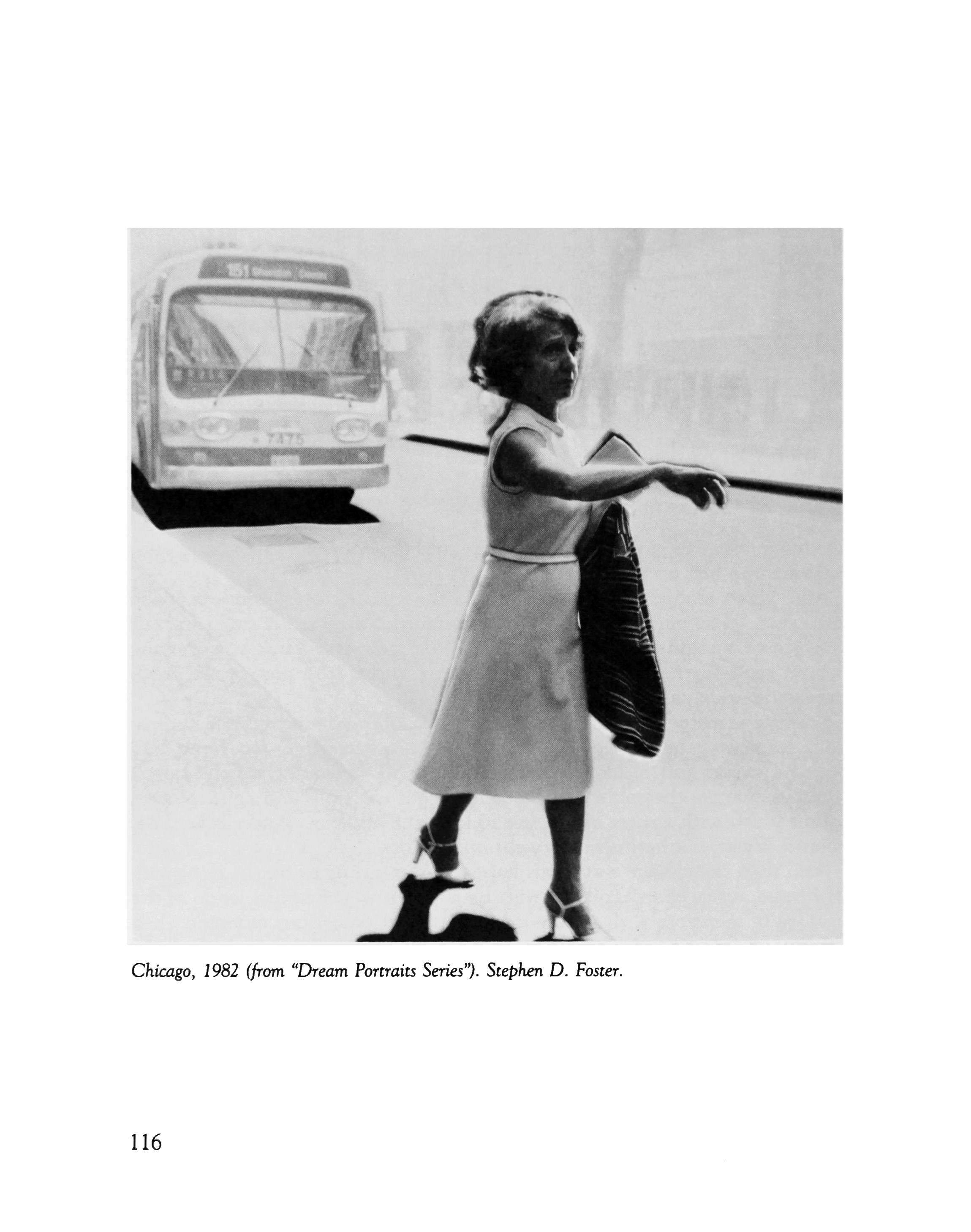
Chicago, 1982 (from "Dream Portraits Series"). Stephen D. Foster.
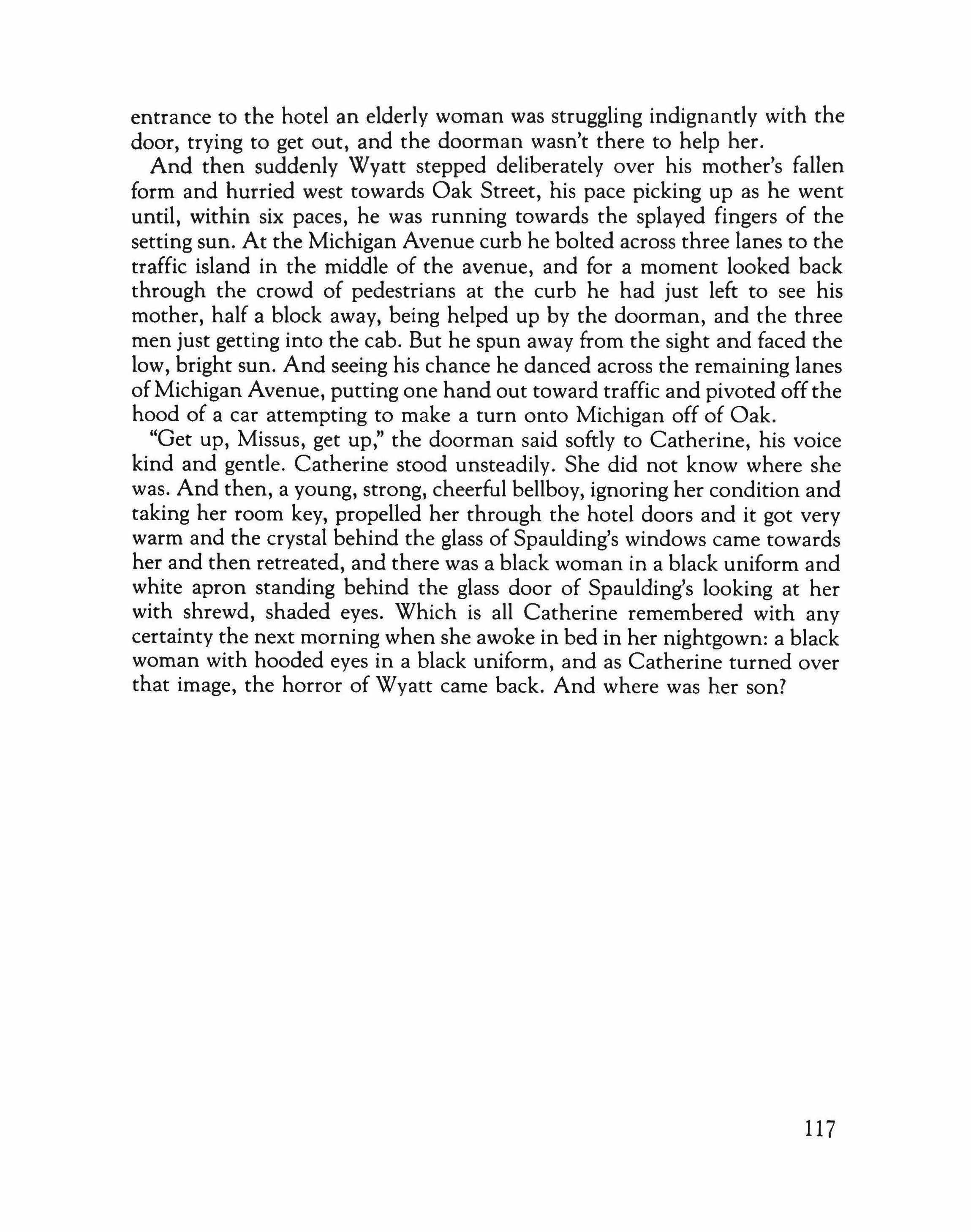
entrance to the hotel an elderly woman was struggling indignantly with the door, trying to get out, and the doorman wasn't there to help her.
And then suddenly Wyatt stepped deliberately over his mother's fallen form and hurried west towards Oak Street, his pace picking up as he went until, within six paces, he was running towards the splayed fingers of the setting sun. At the Michigan Avenue curb he bolted across three lanes to the traffic island in the middle of the avenue, and for a moment looked back through the crowd of pedestrians at the curb he had just left to see his mother, half a block away, being helped up by the doorman, and the three men just getting into the cab. But he spun away from the sight and faced the low, bright sun. And seeing his chance he danced across the remaining lanes of Michigan Avenue, putting one hand out toward traffic and pivoted offthe hood of a car attempting to make a turn onto Michigan off of Oak.
"Get up, Missus, get up," the doorman said softly to Catherine, his voice kind and gentle. Catherine stood unsteadily. She did not know where she was. And then, a young, strong, cheerful bellboy, ignoring her condition and taking her room key, propelled her through the hotel doors and it got very warm and the crystal behind the glass of Spaulding's windows came towards her and then retreated, and there was a black woman in a black uniform and white apron standing behind the glass door of Spaulding's looking at her with shrewd, shaded eyes. Which is all Catherine remembered with any certainty the next morning when she awoke in bed in her nightgown: a black woman with hooded eyes in a black uniform, and as Catherine turned over that image, the horror of Wyatt came back. And where was her son?
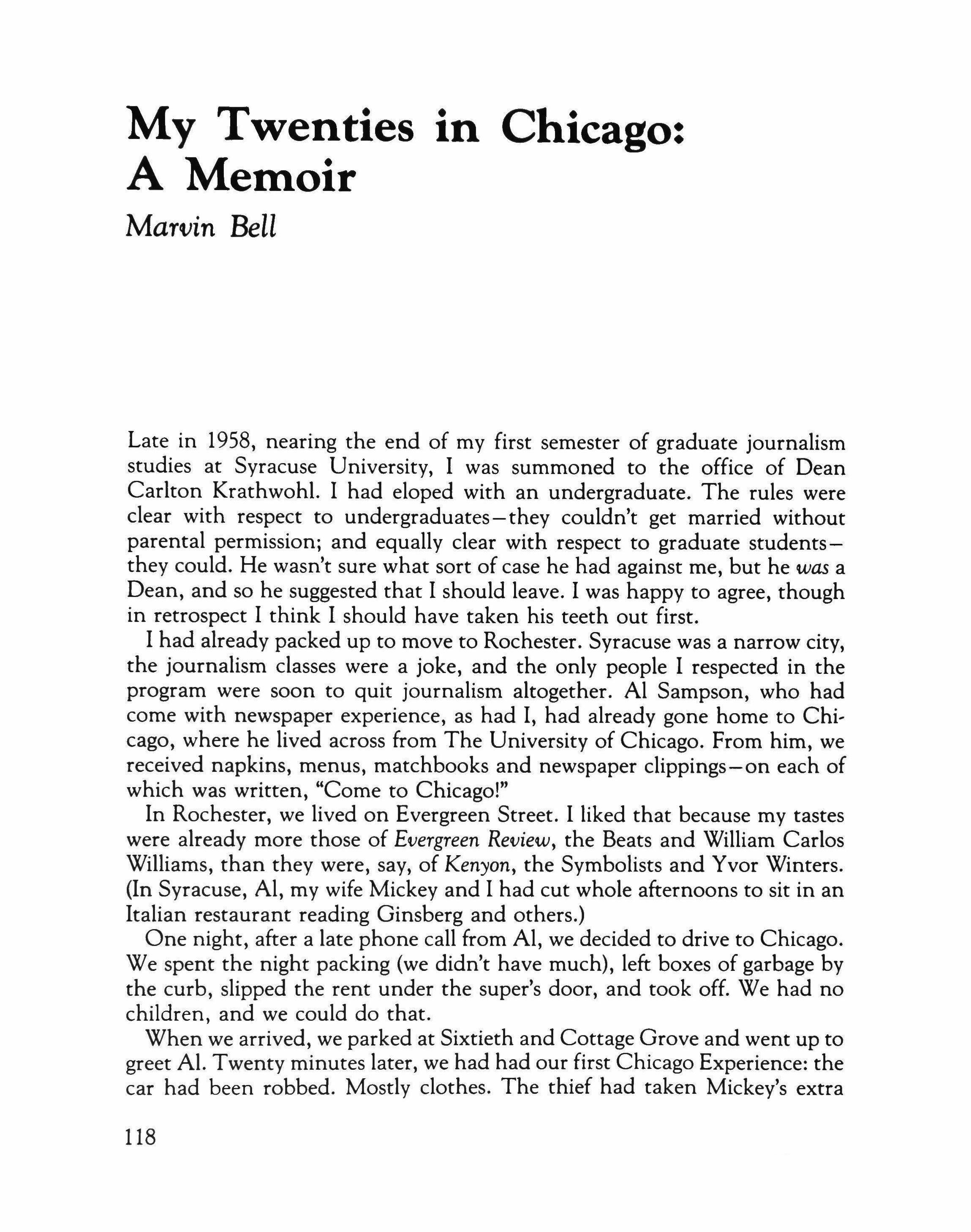
Late in 1958, nearing the end of my first semester of graduate journalism studies at Syracuse University, I was summoned to the office of Dean Carlton Krathwohl. I had eloped with an undergraduate. The rules were clear with respect to undergraduates-they couldn't get married without parental permission; and equally clear with respect to graduate studentsthey could. He wasn't sure what sort of case he had against me, but he was a Dean, and so he suggested that I should leave. I was happy to agree, though in retrospect I think I should have taken his teeth out first.
I had already packed up to move to Rochester. Syracuse was a narrow city, the journalism classes were a joke, and the only people I respected in the program were soon to quit journalism altogether. Al Sampson, who had come with newspaper experience, as had I, had already gone home to Chi, cago, where he lived across from The University of Chicago. From him, we received napkins, menus, matchbooks and newspaper clippings-on each of which was written, "Come to Chicago!"
In Rochester, we lived on Evergreen Street. I liked that because my tastes were already more those of Evergreen Review, the Beats and William Carlos Williams, than they were, say, of Kenyon, the Symbolists and Yvor Winters. (In Syracuse, AI, my wife Mickey and I had cut whole afternoons to sit in an Italian restaurant reading Ginsberg and orhers.)
One night, after a late phone call from AI, we decided to drive to Chicago. We spent the night packing (we didn't have much), left boxes of garbage by the curb, slipped the rent under the super's door, and took off. We had no children, and we could do that.
When we arrived, we parked at Sixtieth and Cottage Grove and went up to greet AI. Twenty minutes later, we had had our first Chicago Experience: the car had been robbed. Mostly clothes. The thief had taken Mickey's extra

purse, and we laughed to imagine him opening it to find nothing but Kotex. He had left behind two items: my baseball glove, which he probably hadn't seen in the dark, and my folder full of poems. It was my first rejection.
I enrolled at the University and, over the next two years, took a slow M.A. in Literature and worked for the Law Library. During that time, my father died, my wife and I had a child and, soon afterwards, were divorced, I kept the child, I met my present wife, I went on photographing, and I began to write poetry seriously. It was in Chicago that I was confirmed in my gut feelings about art, and it was there that my life took an irreversible turn toward it.
We lived in Hyde Park-first over the Accent Shop on the corner of Fiftvthird and Blackstone, later on the third story of an old wooden house with wide stairways and tiny windows in odd corners, on the corner of Fiftvsecond and Hyde Park's only curved street then, Kenwood. Hyde Park at that time was a genuinely integrated area, full of political activists (Back-ofthe-Yards, S.A.N.E., Civil Rights, Socialists, Trotskyites, Stalinists, Black Muslims: one man billed himself as a "professional revolutionary" and worked the night shift for the railroad as a brakeman; when I attended a meeting to prepare a civil rights demonstration, it soon became obvious that theoretical disagreements would destroy the American Left), folk musicians, artists and writers of all kinds. The Near North was known to the outside world as the "arty" neighborhood, and each year it made a pitch for that title with its splashy Art Fair, but the action (and low rents) were in Hyde Park.
Some of my friends were con men and worse. Statements, the magazine of literary and visual materials which I had begun in Rochester, was displayed in the windows of two Hyde Park art galleries, which were fronts. One of them was never open. The story was that the owner was an interior decorator out on assignments. In fact, he was part of an antique-stealing gang which was rumored to pay the cops to let them roll up a moving van to an empty house and take the rugs, lamps, etc. It was my impression that, not only were the cops in on it, but so were many of the owners, who hoped to claim insured losses. From the other gallery, its owner ran a variety of cons-using a distinguished-looking but impoverished shill among the rich to sell overpriced artwork. This man could see the handwriting on the wall. When buyers wanted Abstract Expressionism, he invented a German Abstract Expressionist. In fact, he had once taught art, and now he did these "Ger, man" paintings himself, quickly. After his gallery closed, I was delighted to discover that he had sold these phonies to a higher-class Chicago gallery. I kept a chair in his gallery where I read books from the used-book shelves. Whenever I came across something good, sometimes worth something (auto,
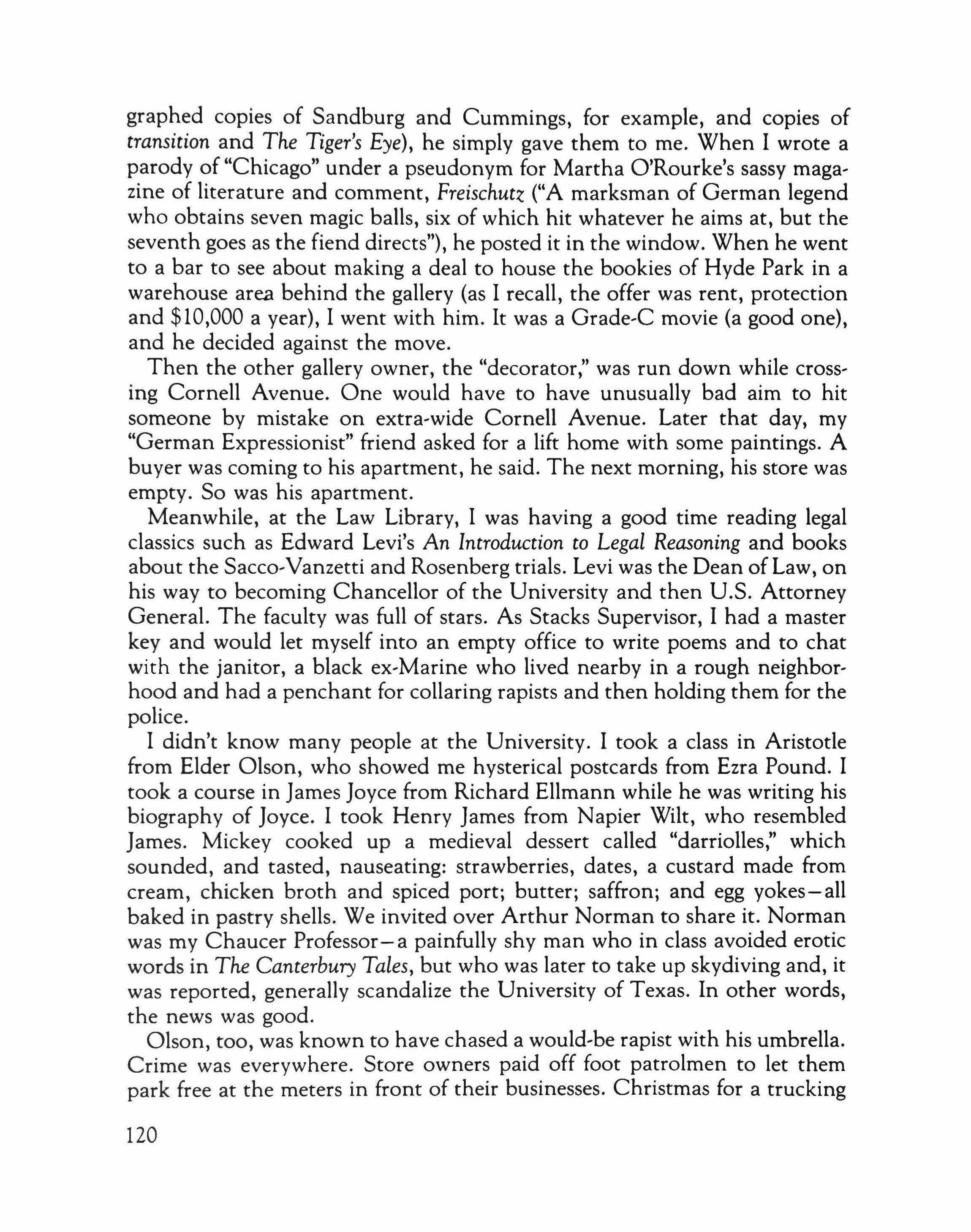
graphed copies of Sandburg and Cummings, for example, and copies of transition and The Tiger's Eye), he simply gave them to me. When I wrote a parody of "Chicago" under a pseudonym for Martha O'Rourke's sassy magazine of literature and comment, Freischutz ("A marksman of German legend who obtains seven magic balls, six of which hit whatever he aims at, but the seventh goes as the fiend directs"), he posted it in the window. When he went to a bar to see about making a deal to house the bookies of Hyde Park in a warehouse area behind the gallery (as I recall, the offer was rent, protection and $10,000 a year), I went with him. It was a Grade-C movie (a good one), and he decided against the move.
Then the other gallery owner, the "decorator," was run down while cross, ing Cornell Avenue. One would have to have unusually bad aim to hit someone by mistake on extra-wide Cornell Avenue. Later that day, my "German Expressionist" friend asked for a lift home with some paintings. A buyer was coming to his apartment, he said. The next morning, his store was empty. So was his apartment.
Meanwhile, at the Law Library, I was having a good time reading legal classics such as Edward Levi's An Introduction to Legal Reasoning and books about the Sacco-Vanzetti and Rosenberg trials. Levi was the Dean of Law, on his way to becoming Chancellor of the University and then U.S. Attorney General. The faculty was full of stars. As Stacks Supervisor, I had a master key and would let myself into an empty office to write poems and to chat with the janitor, a black ex-Marine who lived nearby in a rough neighbor, hood and had a penchant for collaring rapists and then holding them for the police.
I didn't know many people at the University. I took a class in Aristotle from Elder Olson, who showed me hysterical postcards from Ezra Pound. I took a course in James Joyce from Richard Ellmann while he was writing his biography of Joyce. I took Henry James from Napier Wilt, who resembled James. Mickey cooked up a medieval dessert called "darriolles," which sounded, and tasted, nauseating: strawberries, dates, a custard made from cream, chicken broth and spiced port; butter; saffron; and egg yokes-all baked in pastry shells. We invited over Arthur Norman to share it. Norman was my Chaucer Professor-a painfully shy man who in class avoided erotic words in The Canterbury Tales, but who was later to take up skydiving and, it was reported, generally scandalize the University of Texas. In other words, the news was good.
Olson, too, was known to have chased a would-be rapist with his umbrella. Crime was everywhere. Store owners paid off foot patrolmen to let them park free at the meters in front of their businesses. Christmas for a trucking

company meant envelopes of bribe money. Cottage Grove Avenue was infamous and, when I made the mistake one night of driving down it with New York plates, I was pulled over and detained until I agreed to "settle the ticket" there and then. Afterwards, the cop wanted my help in buying a good used car. After all, the shakedown was routine.
Over at the Institute of Design, the photographers Harry Callahan and Aaron Siskind were at the height of their powers. The most interesting of their talented students was, to my mind, Rodney Galarneau, a former monk, in-training. At his storefront house near Comiskey Park, we gathered to look at photographs and to discuss multiple exposures, darkroom manipulations, photograms, chemgrams, mixed media, and everything else. After a while, Rodney moved his bed to a loft and turned the place into a gallery he called Photo Independent.
I believed, and still do, that one can't learn to see photographically with a direct-viewfinder camera. A 21/4 X 21/4 Rollei or Hasselblad, for example, was the minimum. A larger camera was even better, and most of the time I used a 4 X 5 Graphic View. For a while I used an ancient, collapsible field model 8 X 10 with a soft focus double-element lens and a pneumatic shutter. I had bought it by answering an unsigned ad from, it turned out, one Vernon Cheek, an acquaintance from Rochester. It was a great revolutionary time for creative photography, which was not yet widely accepted by the art depart' ments of colleges or by museums, and which was practiced only by the odd and devoted.
I don't like all cities, but I liked Chicago. Things happened on the streets, one could drive from one side to the other easily and quickly. Hyde Park was as lively as Greenwich Village, and then there was WFMT and its Midnight Special. In our third-floor apartment, we kept an old console radio turned to WFMT while our son Nathan slept nearby. After Mickey and I separated, Mrs. Porter helped me to take care of my infant son. She and her boyfriend were deep black in color, and they attracted attention when they took my fair-skinned, blond son for a carriage ride. As it happened, my best friends in Hyde Park were blacks, though the Black Muslims were already writing messages on the walls against black-white friendships, and my ping-pong partner, Donald Johnson, who lived at the Hyde Park Y and worked as a conductor for the I.C.R.R., was "spoken to" about being seen with me in public. Nonetheless, I played for an otherwise all-black _softball team, and a picture of me talking about poetry to a black audience appeared in the Chicago Defender.
Finally, it was time to take my M.A. comps. The University required that I be enrolled to take them. How far could I go? The answer was to the
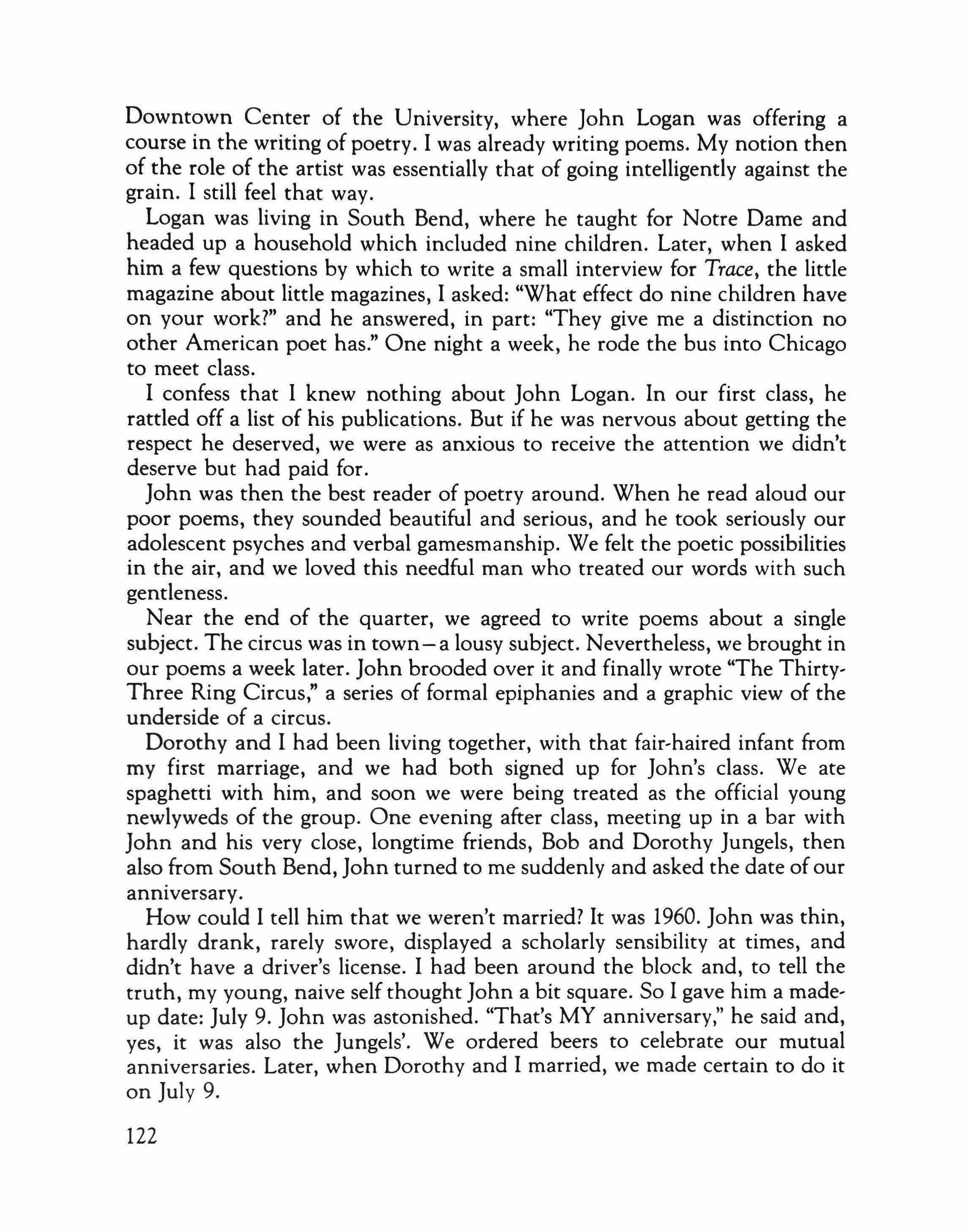
Downtown Center of the University, where John Logan was offering a course in the writing of poetry. I was already writing poems. My notion then of the role of the artist was essentially that of going intelligently against the grain. I still feel that way.
Logan was living in South Bend, where he taught for Notre Dame and headed up a household which included nine children. Later, when I asked him a few questions by which to write a small interview for Trace, the little magazine about little magazines, I asked: "What effect do nine children have on your work?" and he answered, in part: "They give me a distinction no other American poet has." One night a week, he rode the bus into Chicago to meet class.
I confess that I knew nothing about John Logan. In our first class, he rattled off a list of his publications. But if he was nervous about getting the respect he deserved, we were as anxious to receive the attention we didn't deserve but had paid for.
John was then the best reader of poetry around. When he read aloud our poor poems, they sounded beautiful and serious, and he took seriously our adolescent psyches and verbal gamesmanship. We felt the poetic possibilities in the air, and we loved this needful man who treated our words with such gentleness.
Near the end of the quarter, we agreed to write poems about a single subject. The circus was in town - a lousy subject. Nevertheless, we brought in our poems a week later. John brooded over it and finally wrote "The ThirtyThree Ring Circus," a series of formal epiphanies and a graphic view of the underside of a circus.
Dorothy and I had been living together, with that fair-haired infant from my first marriage, and we had both signed up for John's class. We ate spaghetti with him, and soon we were being treated as the official young newlyweds of the group. One evening after class, meeting up in a bar with John and his very close, longtime friends, Bob and Dorothy Jungels, then also from South Bend, John turned to me suddenly and asked the date of our anniversary.
How could I tell him that we weren't married? It was 1960. John was thin, hardly drank, rarely swore, displayed a scholarly sensibility at times, and didn't have a driver's license. I had been around the block and, to tell the truth, my young, naive self thought John a bit square. So I gave him a madeup date: July 9. John was astonished. "That's MY anniversary," he said and, yes, it was also the Jungels'. We ordered beers to celebrate our mutual anniversaries. Later, when Dorothy and I married, we made certain to do it on July 9.
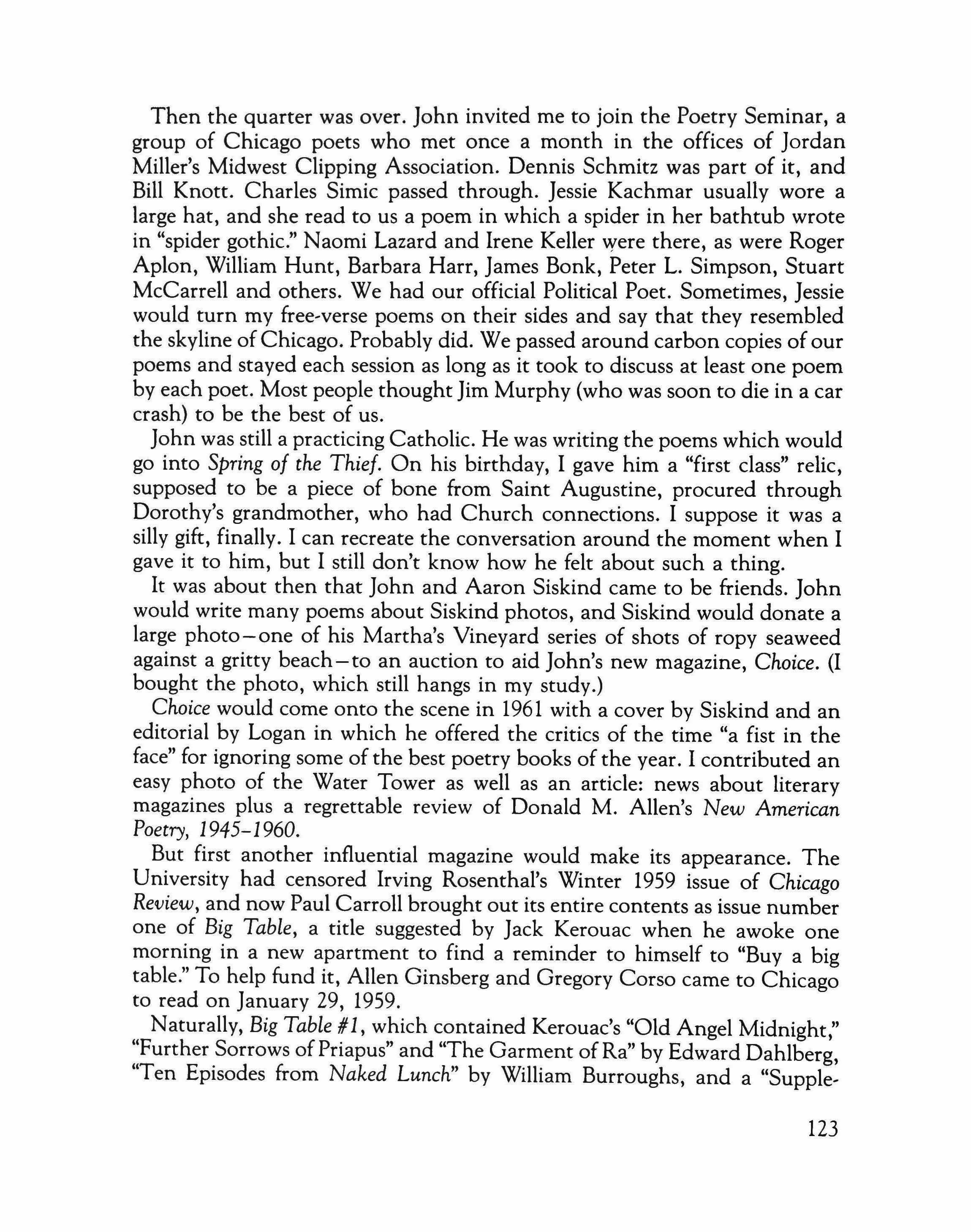
Then the quarter was over. John invited me to join the Poetry Seminar, a group of Chicago poets who met once a month in the offices of Jordan Miller's Midwest Clipping Association. Dennis Schmitz was part of it, and Bill Knott. Charles Simic passed through. Jessie Kachmar usually wore a large hat, and she read to us a poem in which a spider in her bathtub wrote in "spider gothic." Naomi Lazard and Irene Keller were there, as were Roger Aplon, William Hunt, Barbara Harr, James Bonk, Peter L. Simpson, Stuart McCarrell and others. We had our official Political Poet. Sometimes, Jessie would turn my free-verse poems on their sides and say that they resembled the skyline ofChicago. Probably did. We passed around carbon copies of our poems and stayed each session as long as it took to discuss at least one poem by each poet. Most people thought Jim Murphy (who was soon to die in a car crash) to be the best of us.
John was still a practicing Catholic. He was writing the poems which would go into Spring of the Thief. On his birthday, I gave him a "first class" relic, supposed to be a piece of bone from Saint Augustine, procured through Dorothy's grandmother, who had Church connections. I suppose it was a silly gift, finally. I can recreate the conversation around the moment when I gave it to him, but I still don't know how he felt about such a thing.
It was about then that John and Aaron Siskind came to be friends. John would write many poems about Siskind photos, and Siskind would donate a large photo - one of his Martha's Vineyard series of shots of ropy seaweed against a gritty beach-to an auction to aid John's new magazine, Choice. (I bought the photo, which still hangs in my study.)
Choice would come onto the scene in 1961 with a cover by Siskind and an editorial by Logan in which he offered the critics of the time "a fist in the face" for ignoring some of the best poetry books of the year. I contributed an easy photo of the Water Tower as well as an article: news about literary magazines plus a regrettable review of Donald M. Allen's New American Poetry, 1945-1960.
But first another influential magazine would make its appearance. The University had censored Irving Rosenthal's Winter 1959 issue of Chicago Review, and now Paul Carroll brought out its entire contents as issue number one of Big Table, a title suggested by Jack Kerouac when he awoke one morning in a new apartment to find a reminder to himself to "Buy a big table." To help fund it, Allen Ginsberg and Gregory Corso came to Chicago to read on January 29, 1959.
Naturally, Big Table #1, which contained Kerouac's "Old Angel Midnight," "Further Sorrows of Priapus" and "The Garment of Ra" by Edward Dahlberg, "Ten Episodes from Naked Lunch" by William Burroughs, and a "Supple-
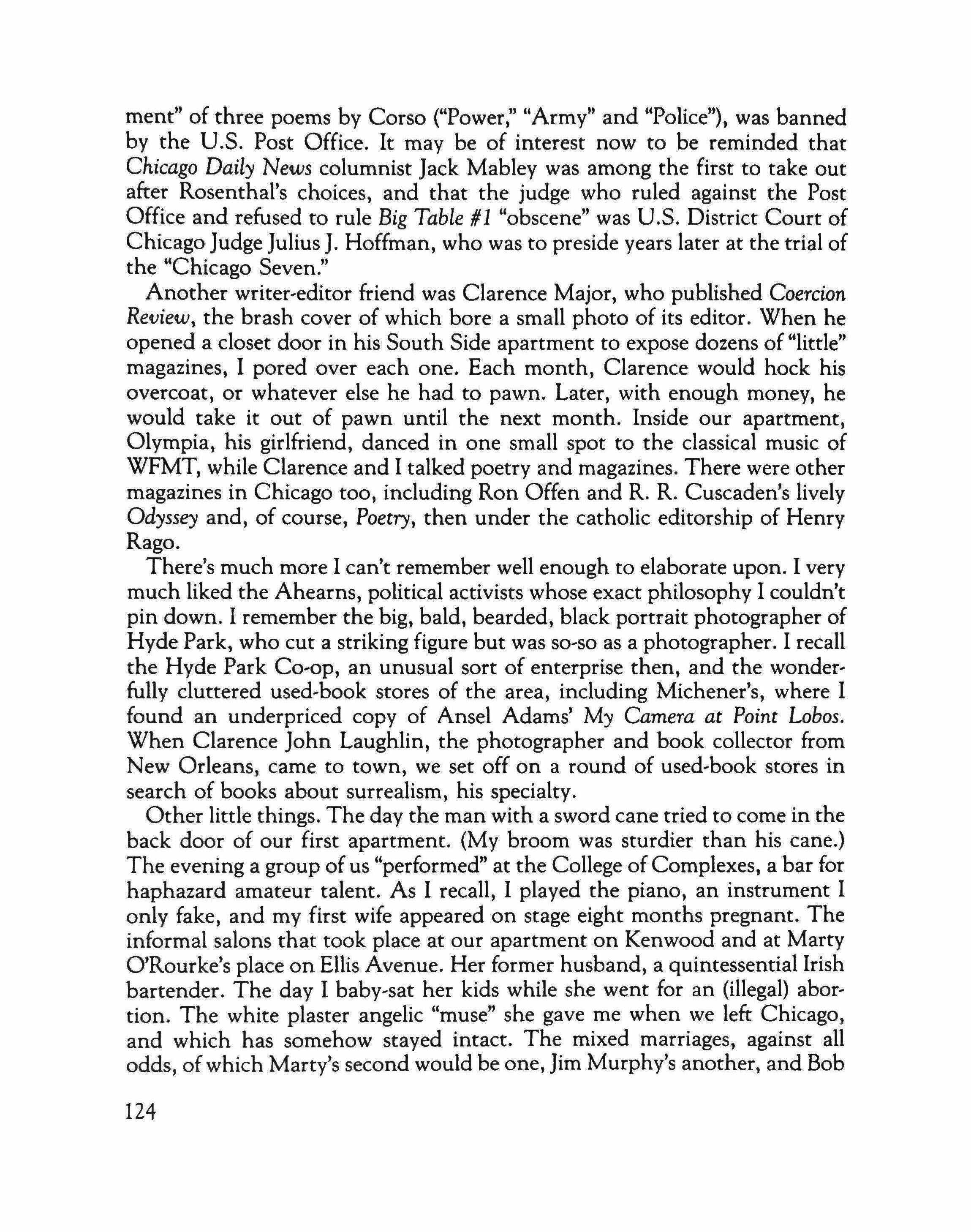
ment" of three poems by Corso ("Power," "Army" and "Police"), was banned by the U.S. Post Office. It may be of interest now to be reminded that Chicago Daily News columnist Jack Mabley was among the first to take out after Rosenthal's choices, and that the judge who ruled against the Post Office and refused to rule Big Table #1 "obscene" was U.S. District Court of Chicago Judge Julius J. Hoffman, who was to preside years later at the trial of the "Chicago Seven."
Another writer-editor friend was Clarence Major, who published Coercion Review, the brash cover of which bore a small photo of its editor. When he opened a closet door in his South Side apartment to expose dozens of "little" magazines, I pored over each one. Each month, Clarence would hock his overcoat, or whatever else he had to pawn. Later, with enough money, he would take it out of pawn until the next month. Inside our apartment, Olympia, his girlfriend, danced in one small spot to the classical music of WFMT, while Clarence and I talked poetry and magazines. There were other magazines in Chicago too, including Ron Offen and R. R. Cuscaden's lively Odyssey and, of course, Poetry, then under the catholic editorship of Henry Rago.
There's much more I can't remember well enough to elaborate upon. I very much liked the Ahearns, political activists whose exact philosophy I couldn't pin down. I remember the big, bald, bearded, black portrait photographer of Hyde Park, who cut a striking figure but was so-so as a photographer. I recall the Hyde Park Co-op, an unusual sort of enterprise then, and the wonderfully cluttered used-book stores of the area, including Michener's, where I found an underpriced copy of Ansel Adams' My Camera at Point Lobos. When Clarence John Laughlin, the photographer and book collector from New Orleans, carne to town, we set off on a round of used-book stores in search of books about surrealism, his specialty.
Other little things. The day the man with a sword cane tried to corne in the back door of our first apartment. (My broom was sturdier than his cane.)
The evening a group of us "performed" at the College of Complexes, a bar for haphazard amateur talent. As I recall, I played the piano, an instrument I only fake, and my first wife appeared on stage eight months pregnant. The informal salons that took place at our apartment on Kenwood and at Marty O'Rourke's place on Ellis Avenue. Her former husband, a quintessential Irish bartender. The day I baby-sat her kids while she went for an (illegal) abortion. The white plaster angelic "muse" she gave me when we left Chicago, and which has somehow stayed intact. The mixed marriages, against all odds, ofwhich Marty's second would be one, Jim Murphy's another, and Bob
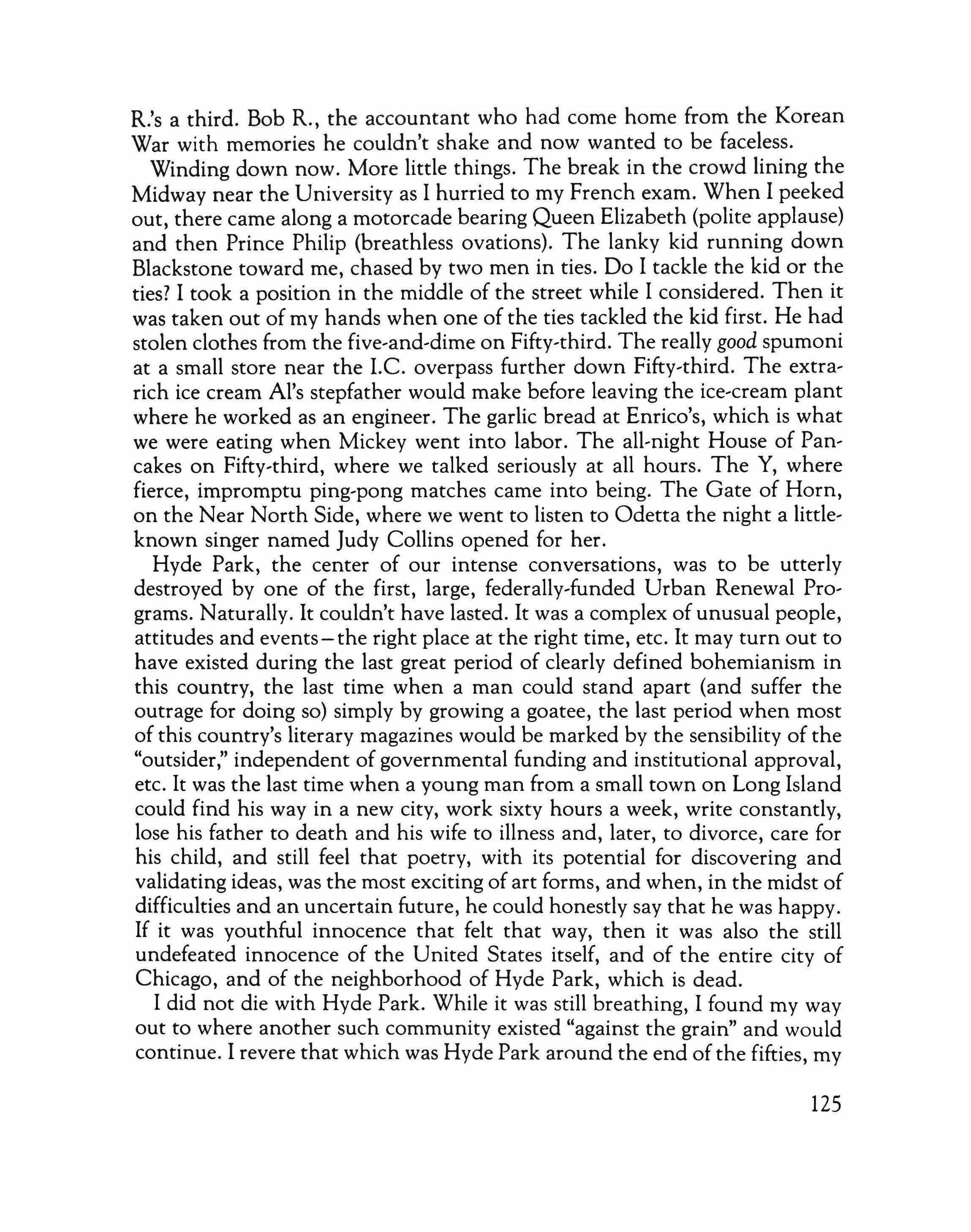
R.'s a third. Bob R., the accountant who had come home from the Korean War with memories he couldn't shake and now wanted to be faceless.
Winding down now. More little things. The break in the crowd lining the Midway near the University as I hurried to my French exam. When I peeked out, there came along a motorcade bearing Queen Elizabeth (polite applause) and then Prince Philip (breathless ovations). The lanky kid running down Blackstone toward me, chased by two men in ties. Do I tackle the kid or the ties? I took a position in the middle of the street while I considered. Then it was taken out of my hands when one of the ties tackled the kid first. He had stolen clothes from the five-and-dime on Fifty-third. The really good spumoni at a small store near the I.C. overpass further down Fifty-third. The extra' rich ice cream AI's stepfather would make before leaving the ice-cream plant where he worked as an engineer. The garlic bread at Enrico's, which is what we were eating when Mickey went into labor. The all,night House of Pan, cakes on Fifty-third, where we talked seriously at all hours. The Y, where fierce, impromptu ping-pong matches came into being. The Gate of Horn, on the Near North Side, where we went to listen to Odetta the night a little, known singer named Judy Collins opened for her.
Hyde Park, the center of our intense conversations, was to be utterly destroyed by one of the first, large, federally-funded Urban Renewal Pro' grams. Naturally. It couldn't have lasted. It was a complex of unusual people, attitudes and events-the right place at the right time, etc. It may turn out to have existed during the last great period of clearly defined bohemianism in this country, the last time when a man could stand apart (and suffer the outrage for doing so) simply by growing a goatee, the last period when most of this country's literary magazines would be marked by the sensibility of the "outsider," independent of governmental funding and institutional approval, etc. It was the last time when a young man from a small town on Long Island could find his way in a new city, work sixty hours a week, write constantly, lose his father to death and his wife to illness and, later, to divorce, care for his child, and still feel that poetry, with its potential for discovering and validating ideas, was the most exciting of art forms, and when, in the midst of difficulties and an uncertain future, he could honestly say that he was happy. If it was youthful innocence that felt that way, then it was also the still undefeated innocence of the United States itself, and of the entire city of Chicago, and of the neighborhood of Hyde Park, which is dead.
I did not die with Hyde Park. While it was still breathing, I found my way out to where another such community existed "against the grain" and would continue. I revere that which was Hyde Park around the end ofthe fifties, my
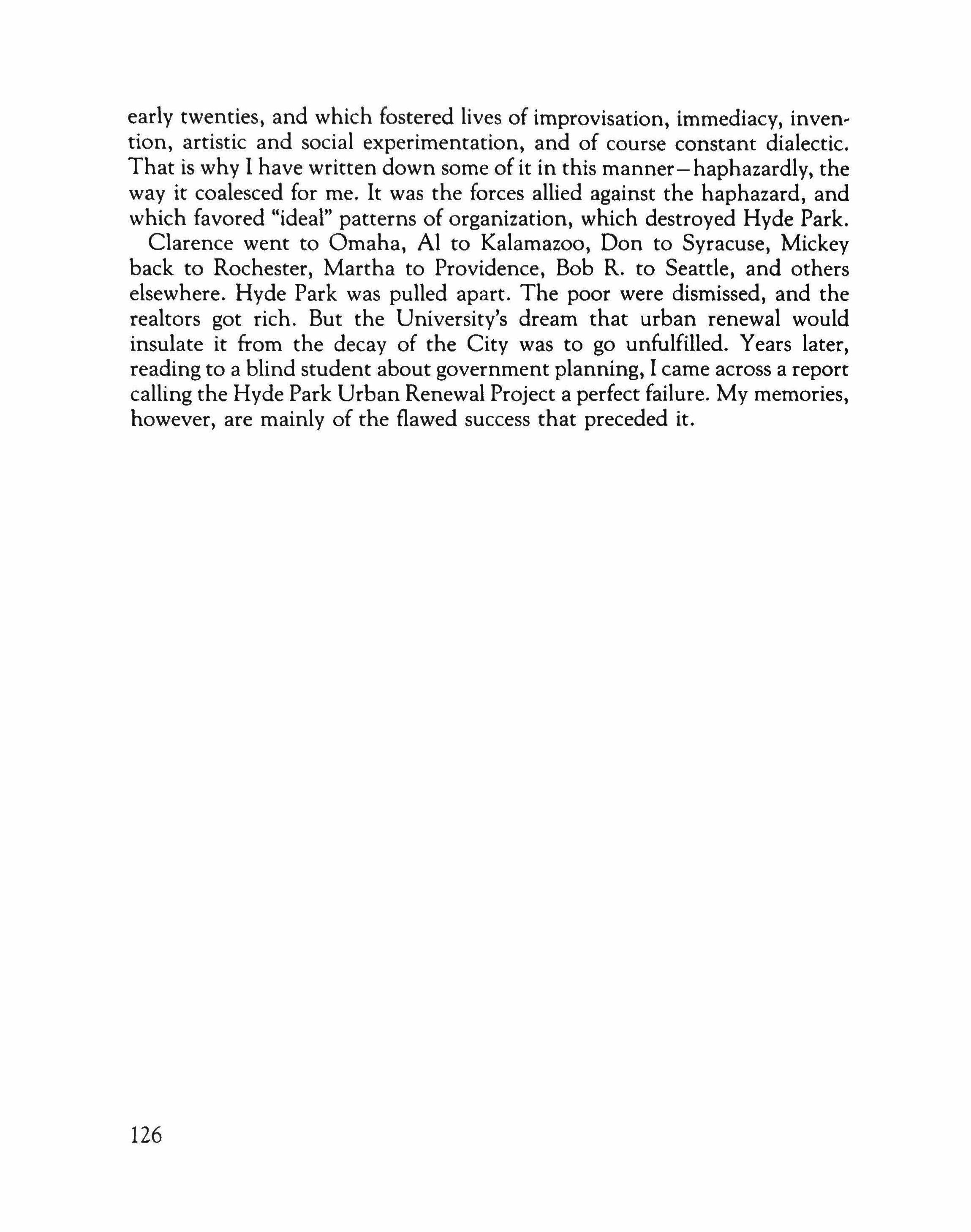
early twenties, and which fostered lives of improvisation, immediacy, invention, artistic and social experimentation, and of course constant dialectic. That is why I have written down some of it in this manner- haphazardly, the way it coalesced for me. It was the forces allied against the haphazard, and which favored "ideal" patterns of organization, which destroyed Hyde Park. Clarence went to Omaha, Al to Kalamazoo, Don to Syracuse, Mickey back to Rochester, Martha to Providence, Bob R. to Seattle, and others elsewhere. Hyde Park was pulled apart. The poor were dismissed, and the realtors got rich. But the University's dream that urban renewal would insulate it from the decay of the City was to go unfulfilled. Years later, reading to a blind student about government planning, I came across a report calling the Hyde Park Urban Renewal Project a perfect failure. My memories, however, are mainly of the flawed success that preceded it.
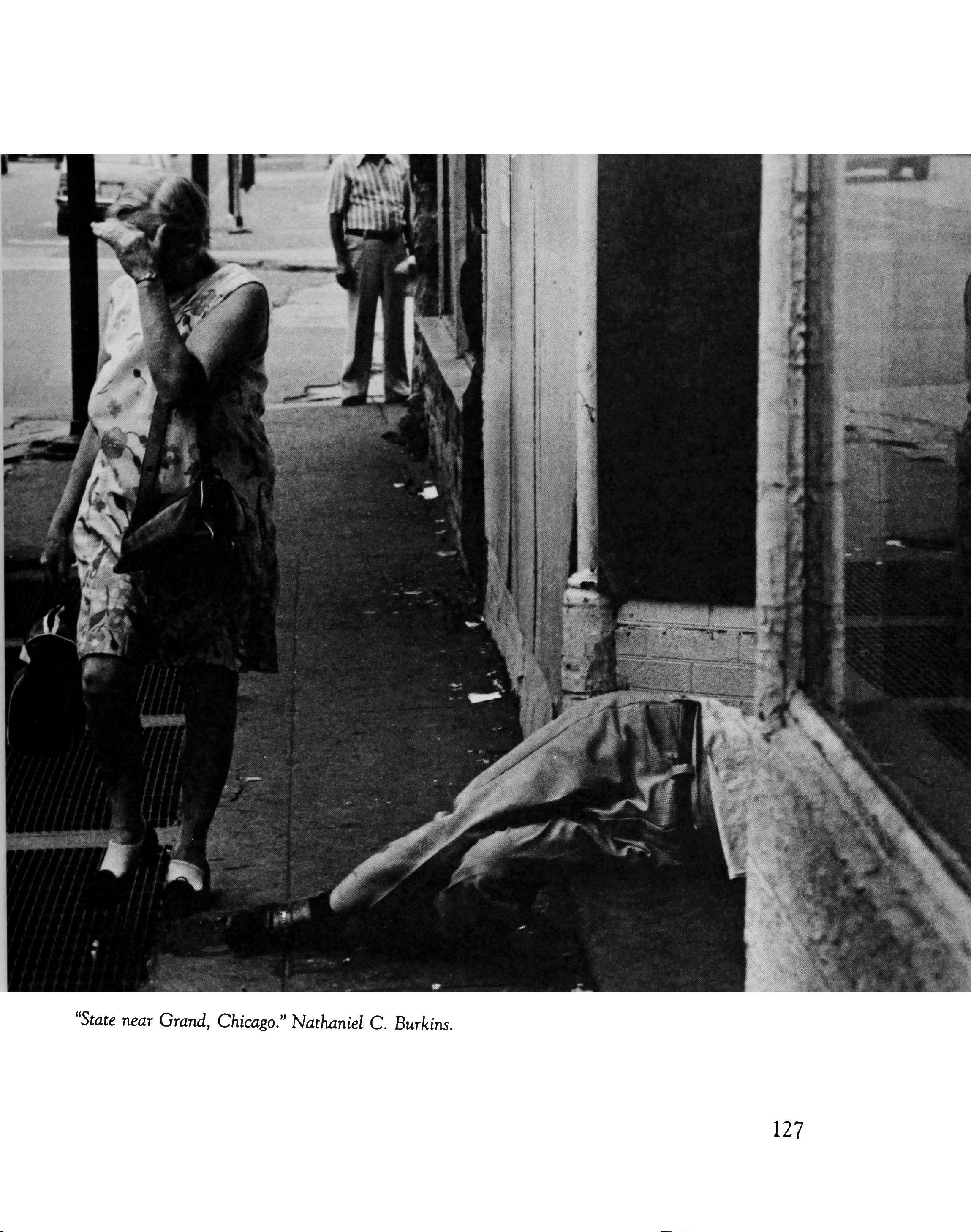
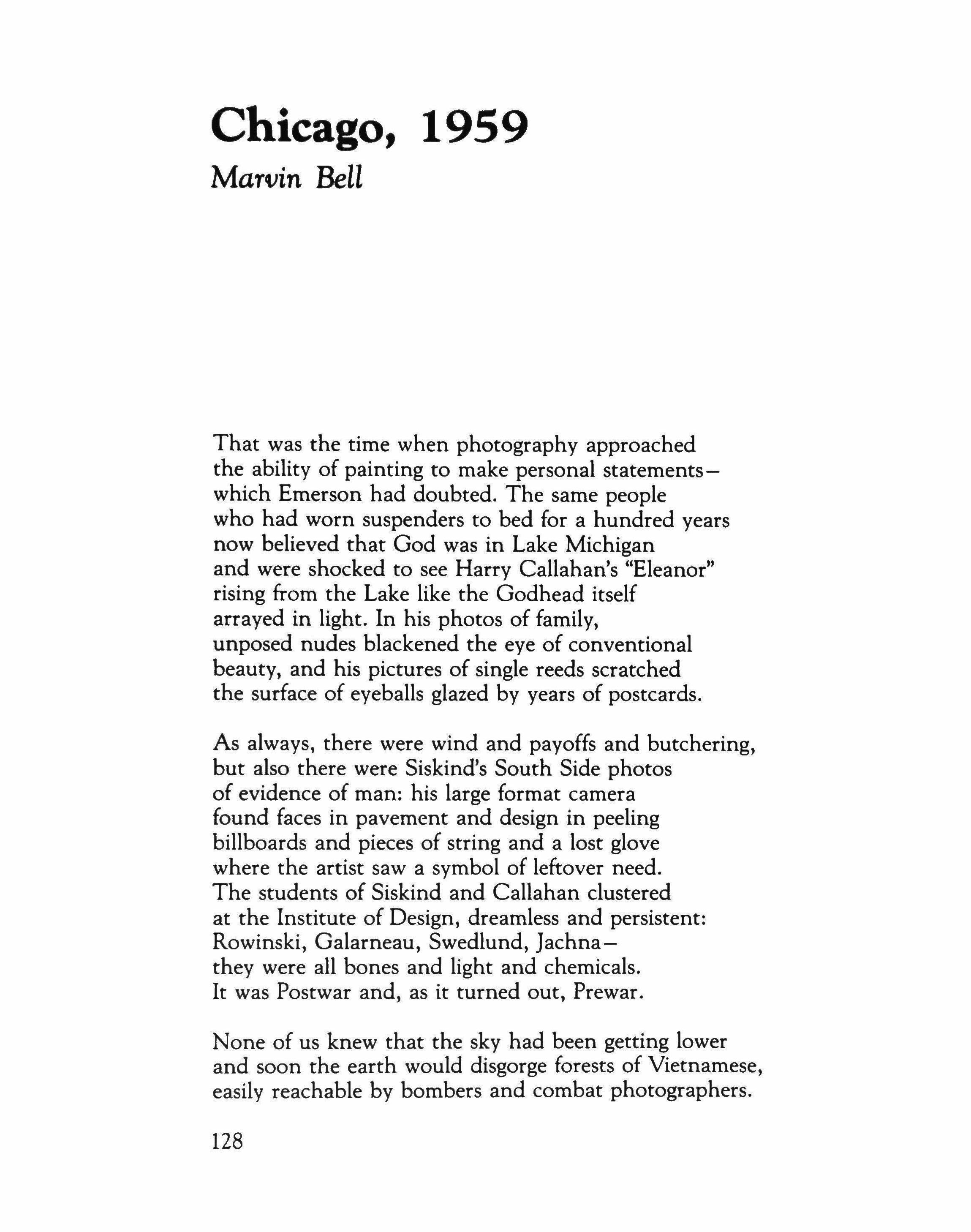
That was the time when photography approached the ability of painting to make personal statementswhich Emerson had doubted. The same people who had worn suspenders to bed for a hundred years now believed that God was in Lake Michigan and were shocked to see Harry Callahan's "Eleanor" rising from the Lake like the Godhead itself arrayed in light. In his photos of family, unposed nudes blackened the eye of conventional beauty, and his pictures of single reeds scratched the surface of eyeballs glazed by years of postcards.
As always, there were wind and payoffs and butchering, but also there were Siskind's South Side photos of evidence of man: his large format camera found faces in pavement and design in peeling billboards and pieces of string and a lost glove where the artist saw a symbol of leftover need. The students of Siskind and Callahan clustered at the Institute of Design, dreamless and persistent: Rowinski, Galarneau, Swedlund, Jachnathey were all bones and light and chemicals. It was Postwar and, as it turned out, Prewar.
None of us knew that the sky had been getting lower and soon the earth would disgorge forests of Vietnamese, easily reachable by bombers and combat photographers.
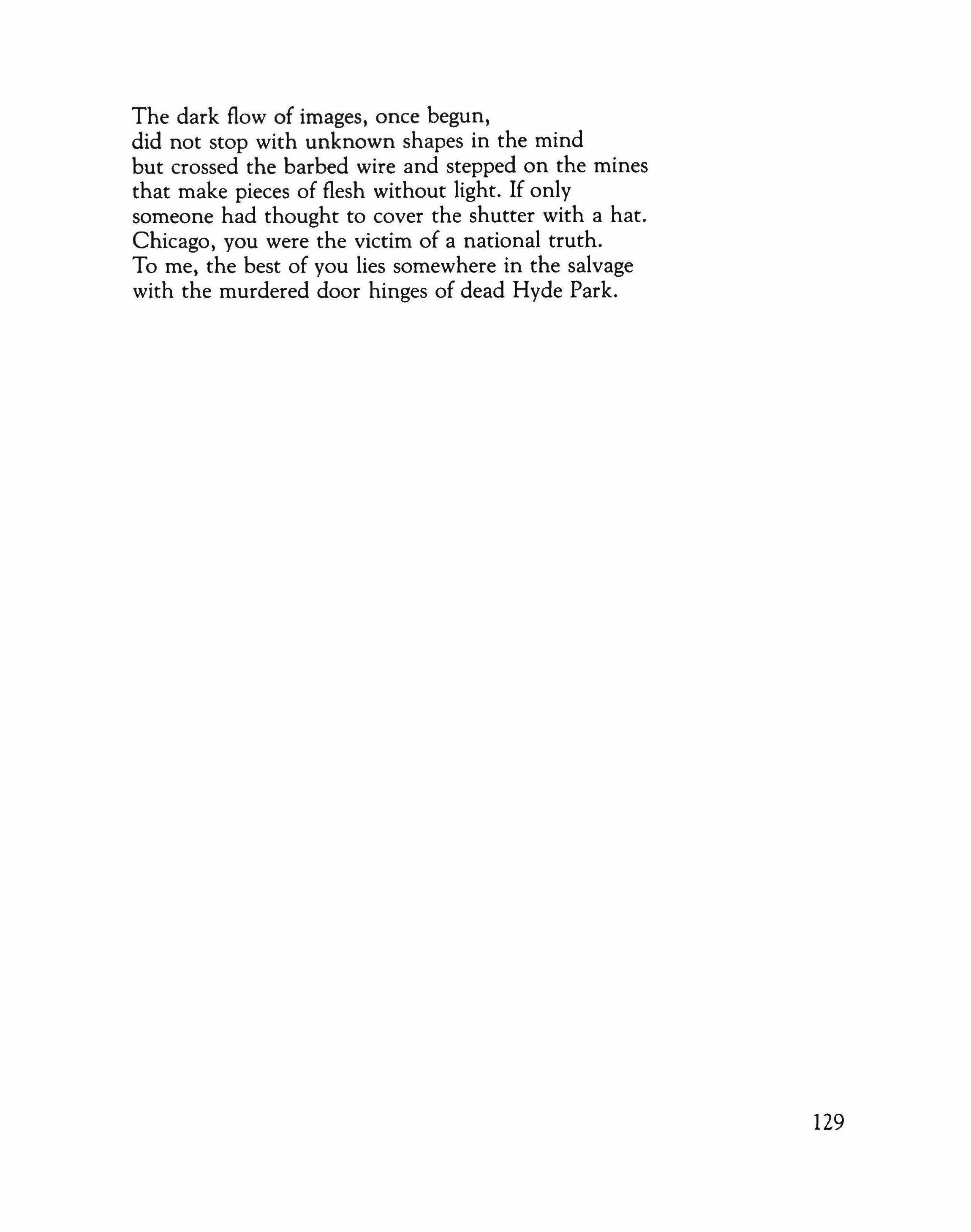
The dark flow of images, once begun, did not stop with unknown shapes in the mind but crossed the barbed wire and stepped on the mines that make pieces of flesh without light. If only someone had thought to cover the shutter with a hat. Chicago, you were the victim of a national truth. To me, the best of you lies somewhere in the salvage with the murdered door hinges of dead Hyde Park.
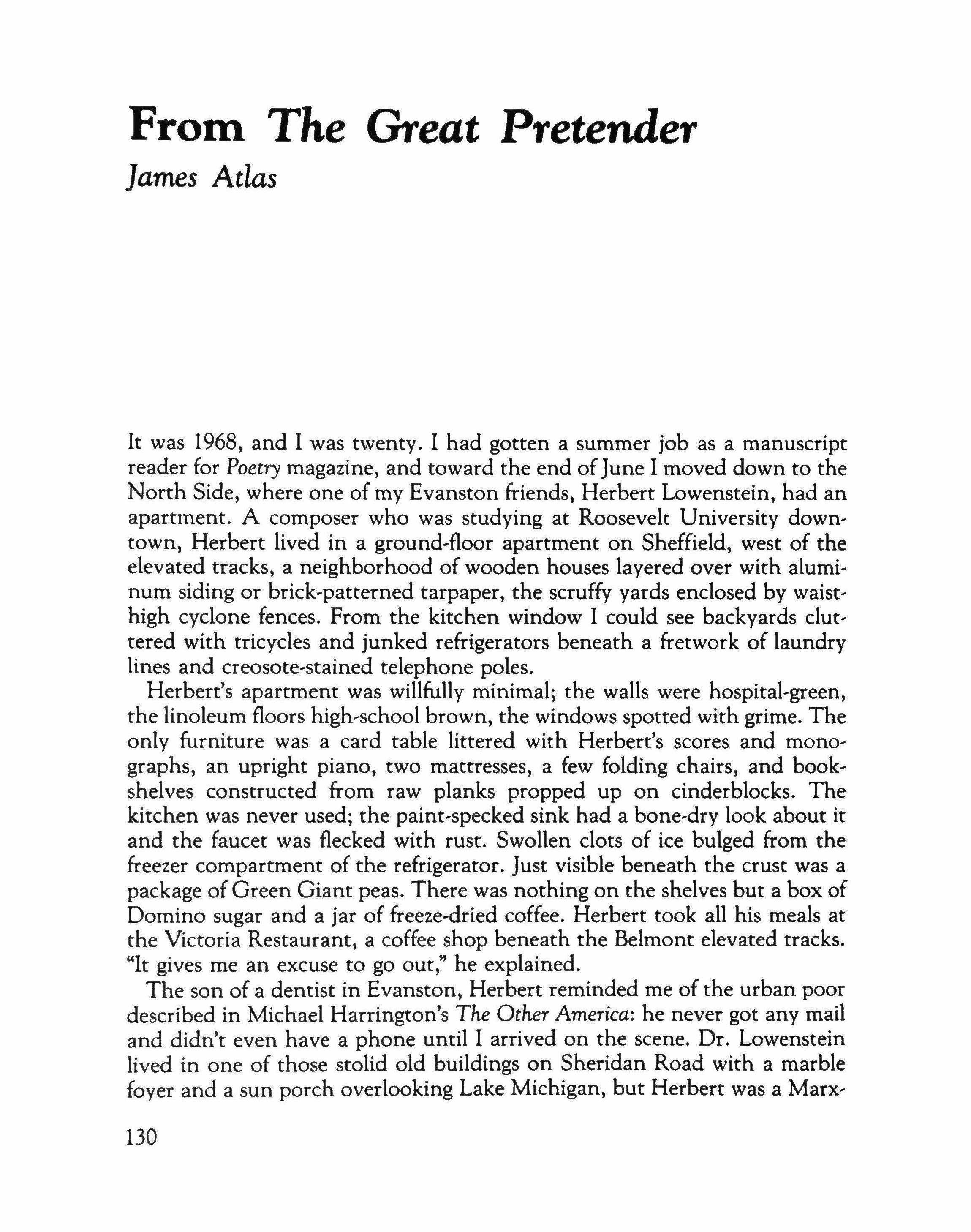
It was 1968, and I was twenty. I had gotten a summer job as a manuscript reader for Poetry magazine, and toward the end ofJune I moved down to the North Side, where one of my Evanston friends, Herbert Lowenstein, had an apartment. A composer who was studying at Roosevelt University down, town, Herbert lived in a ground-floor apartment on Sheffield, west of the elevated tracks, a neighborhood of wooden houses layered over with aluminum siding or brick-patterned tarpaper, the scruffy yards enclosed by waist, high cyclone fences. From the kitchen window I could see backyards cluttered with tricycles and junked refrigerators beneath a fretwork of laundry lines and creosote-stained telephone poles.
Herbert's apartment was willfully minimal; the walls were hospital-green, the linoleum floors high-school brown, the windows spotted with grime. The only furniture was a card table littered with Herbert's scores and mono, graphs, an upright piano, two mattresses, a few folding chairs, and book, shelves constructed from raw planks propped up on cinderblocks. The kitchen was never used; the paint-specked sink had a bone-dry look about it and the faucet was flecked with rust. Swollen clots of ice bulged from the freezer compartment of the refrigerator. Just visible beneath the crust was a package of Green Giant peas. There was nothing on the shelves but a box of Domino sugar and a jar of freeze-dried coffee. Herbert took all his meals at the Victoria Restaurant, a coffee shop beneath the Belmont elevated tracks. "It gives me an excuse to go out:' he explained.
The son of a dentist in Evanston, Herbert reminded me of the urban poor described in Michael Harrington's The Other America: he never got any mail and didn't even have a phone until I arrived on the scene. Dr. Lowenstein lived in one of those stolid old buildings on Sheridan Road with a marble foyer and a sun porch overlooking Lake Michigan, but Herbert was a Marx,
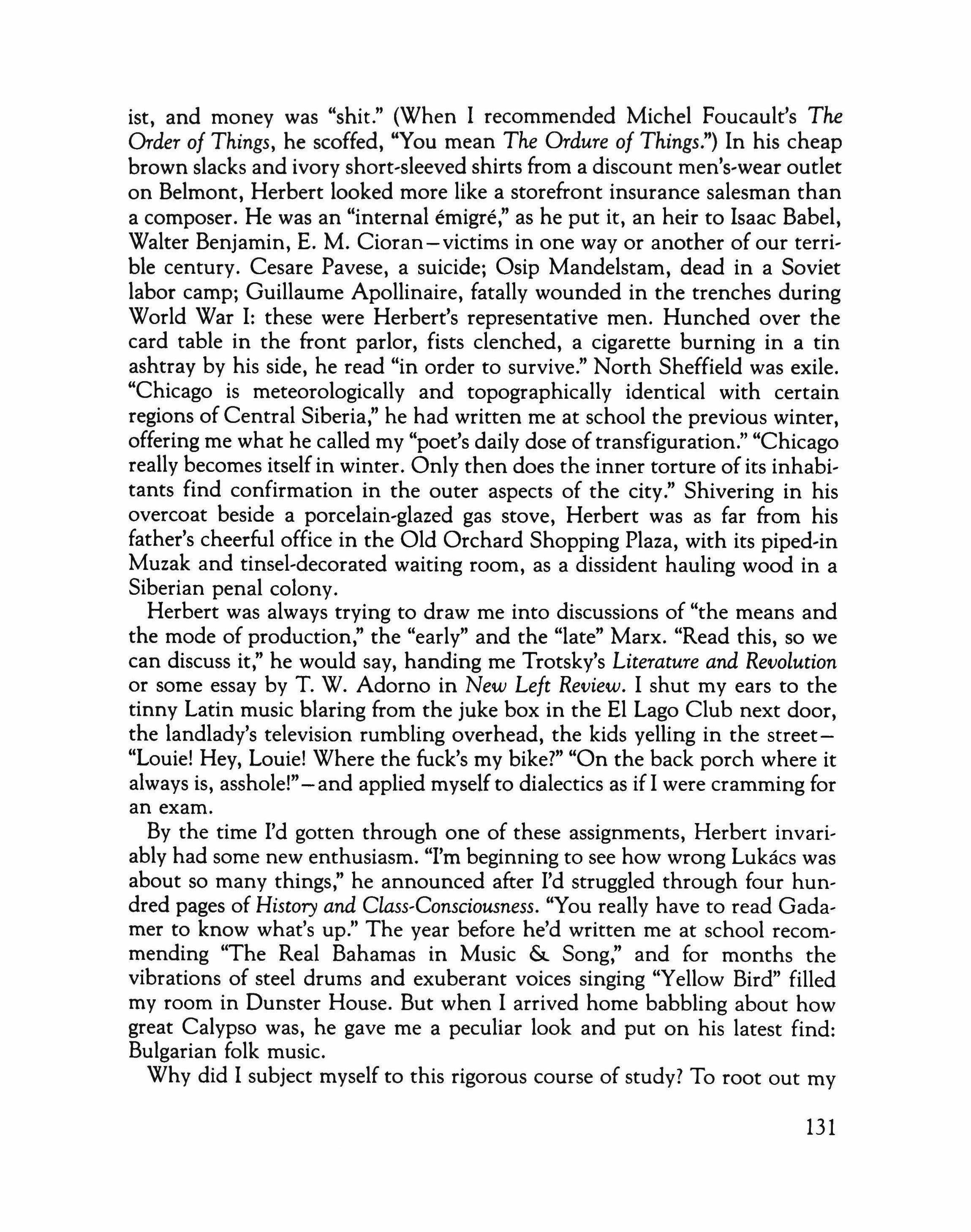
ist, and money was "shit." (When I recommended Michel Foucault's The Order of Things, he scoffed, "You mean The Ordure of Things.") In his cheap brown slacks and ivory short-sleeved shirts from a discount men's-wear outlet on Belmont, Herbert looked more like a storefront insurance salesman than a composer. He was an "internal emigre," as he put it, an heir to Isaac Babel, Walter Benjamin, E. M. Cioran-victims in one way or another of our terri, ble century. Cesare Pavese, a suicide; Osip Mandelstam, dead in a Soviet labor camp; Guillaume Apollinaire, fatally wounded in the trenches during World War I: these were Herbert's representative men. Hunched over the card table in the front parlor, fists clenched, a cigarette burning in a tin ashtray by his side, he read "in order to survive." North Sheffield was exile. "Chicago is meteorologically and topographically identical with certain regions of Central Siberia," he had written me at school the previous winter, offering me what he called my "poet's daily dose of transfiguration." "Chicago really becomes itself in winter. Only then does the inner torture of its inhabitants find confirmation in the outer aspects of the city." Shivering in his overcoat beside a porcelain-glazed gas stove, Herbert was as far from his father's cheerful office in the Old Orchard Shopping Plaza, with its piped-in Muzak and tinsel-decorated waiting room, as a dissident hauling wood in a Siberian penal colony.
Herbert was always trying to draw me into discussions of "the means and the mode of production," the "early" and the "late" Marx. "Read this, so we can discuss it," he would say, handing me Trotsky's Literature and Revolution or some essay by T. W. Adorno in New Left Review. I shut my ears to the tinny Latin music blaring from the juke box in the EI Lago Club next door, the landlady's television rumbling overhead, the kids yelling in the street"Louie! Hey, Louie! Where the fuck's my bike?" "On the back porch where it always is, asshole!" - and applied myself to dialectics as if I were cramming for an exam.
By the time I'd gotten through one of these assignments, Herbert invariably had some new enthusiasm. "I'm beginning to see how wrong Lukacs was about so many things," he announced after I'd struggled through four hun, dred pages of History and Class,Consciousness. "You really have to read Gada, mer to know what's up." The year before he'd written me at school recommending "The Real Bahamas in Music & Song," and for months the vibrations of steel drums and exuberant voices singing "Yellow Bird" filled my room in Dunster House. But when I arrived home babbling about how great Calypso was, he gave me a peculiar look and put on his latest find: Bulgarian folk music.
Why did I subject myself to this rigorous course of study? To root out my
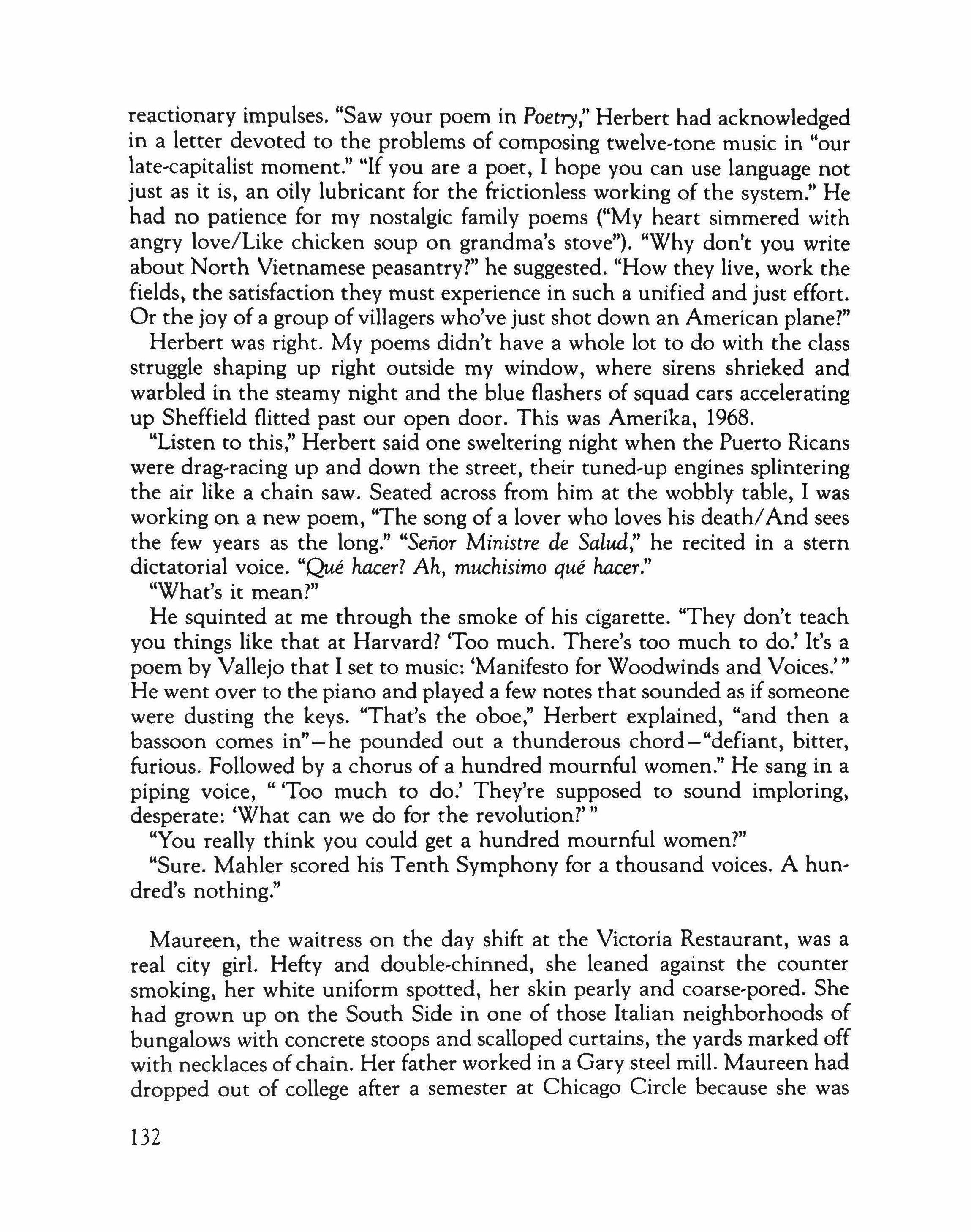
reactionary impulses. "Saw your poem in Poetry;' Herbert had acknowledged in a letter devoted to the problems of composing twelve-tone music in "our late-capitalist moment." "If you are a poet, I hope you can use language not just as it is, an oily lubricant for the frictionless working of the system." He had no patience for my nostalgic family poems ("My heart simmered with angry love/Like chicken soup on grandma's stove"). "Why don't you write about North Vietnamese peasantry?" he suggested. "How they live, work the fields, the satisfaction they must experience in such a unified and just effort. Or the joy of a group of villagers who've just shot down an American plane?"
Herbert was right. My poems didn't have a whole lot to do with the class struggle shaping up right outside my window, where sirens shrieked and warbled in the steamy night and the blue flashers of squad cars accelerating up Sheffield flitted past our open door. This was Amerika, 1968.
"Listen to this;' Herbert said one sweltering night when the Puerto Ricans were drag-racing up and down the street, their tuned-up engines splintering the air like a chain saw. Seated across from him at the wobbly table, I was working on a new poem, "The song of a lover who loves his death/And sees the few years as the long." "Senor Ministre de Salud," he recited in a stern dictatorial voice. "Que haeer? Ah, muehisimo que hacer."
"What's it mean?"
He squinted at me through the smoke of his cigarette. "They don't teach you things like that at Harvard? 'Too much. There's too much to do.' It's a poem by Vallejo that I set to music: 'Manifesto for Woodwinds and Voices.''' He went over to the piano and played a few notes that sounded as if someone were dusting the keys. "That's the oboe," Herbert explained, "and then a bassoon comes inn-he pounded out a thunderous chord-"defiant, bitter, furious. Followed by a chorus of a hundred mournful women." He sang in a piping voice, "'Too much to do.' They're supposed to sound imploring, desperate: 'What can we do for the revolution?'"
"You really think you could get a hundred mournful women?"
"Sure. Mahler scored his Tenth Symphony for a thousand voices. A hundred's nothing."
Maureen, the waitress on the day shift at the Victoria Restaurant, was a real city girl. Hefty and double-chinned, she leaned against the counter smoking, her white uniform spotted, her skin pearly and coarse-pored. She had grown up on the South Side in one of those Italian neighborhoods of bungalows with concrete stoops and scalloped curtains, the yards marked off with necklaces of chain. Her father worked in a Gary steel mill. Maureen had dropped out of college after a semester at Chicago Circle because she was
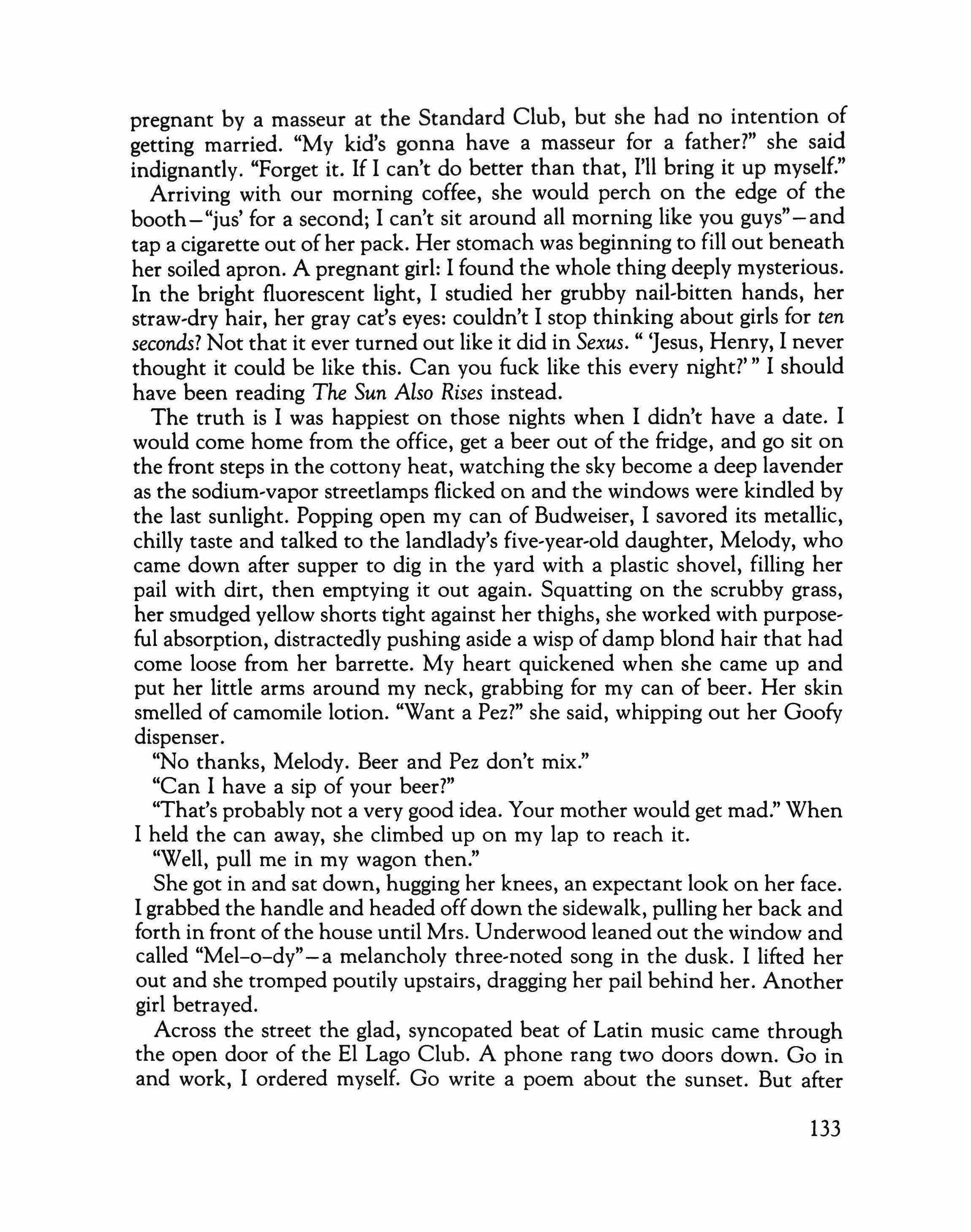
pregnant by a masseur at the Standard Club, but she had no intention of getting married. "My kid's gonna have a masseur for a father?" she said indignantly. "Forget it. If I can't do better than that, I'll bring it up myself."
Arriving with our morning coffee, she would perch on the edge of the booth-"jus' for a second; I can't sit around all morning like you guys"-and tap a cigarette out ofher pack. Her stomach was beginning to fill out beneath her soiled apron. A pregnant girl: I found the whole thing deeply mysterious. In the bright fluorescent light, I studied her grubby nail-bitten hands, her straw-dry hair, her gray eat's eyes: couldn't I stop thinking about girls for ten seconds? Not that it ever turned out like it did in Sexus. 'Jesus, Henry, I never thought it could be like this. Can you fuck like this every night?'" I should have been reading The Sun Also Rises instead.
The truth is I was happiest on those nights when I didn't have a date. I would come home from the office, get a beer out of the fridge, and go sit on the front steps in the cottony heat, watching the sky become a deep lavender as the sodium-vapor streetlamps flicked on and the windows were kindled by the last sunlight. Popping open my can of Budweiser, I savored its metallic, chilly taste and talked to the landlady's five-year-old daughter, Melody, who came down after supper to dig in the yard with a plastic shovel, filling her pail with dirt, then emptying it out again. Squatting on the scrubby grass, her smudged yellow shorts tight against her thighs, she worked with purpose, ful absorption, distractedly pushing aside a wisp of damp blond hair that had come loose from her barrette. My heart quickened when she came up and put her little arms around my neck, grabbing for my can of beer. Her skin smelled of camomile lotion. "Want a Pez?" she said, whipping out her Goofy dispenser.
"No thanks, Melody. Beer and Pez don't mix."
"Can I have a sip of your beer?"
"That's probably not a very good idea. Your mother would get mad." When I held the can away, she climbed up on my lap to reach it.
"Well, pull me in my wagon then."
She got in and sat down, hugging her knees, an expectant look on her face. I grabbed the handle and headed offdown the sidewalk, pulling her back and forth in front ofthe house until Mrs. Underwood leaned out the window and called "Mel-o-dy" - a melancholy three,noted song in the dusk. I lifted her out and she tromped pourily upstairs, dragging her pail behind her. Another girl betrayed.
Across the street the glad, syncopated beat of Latin music came through the open door of the EI Lago Club. A phone rang two doors down. Go in and work, I ordered myself. Go write a poem about the sunset. But after
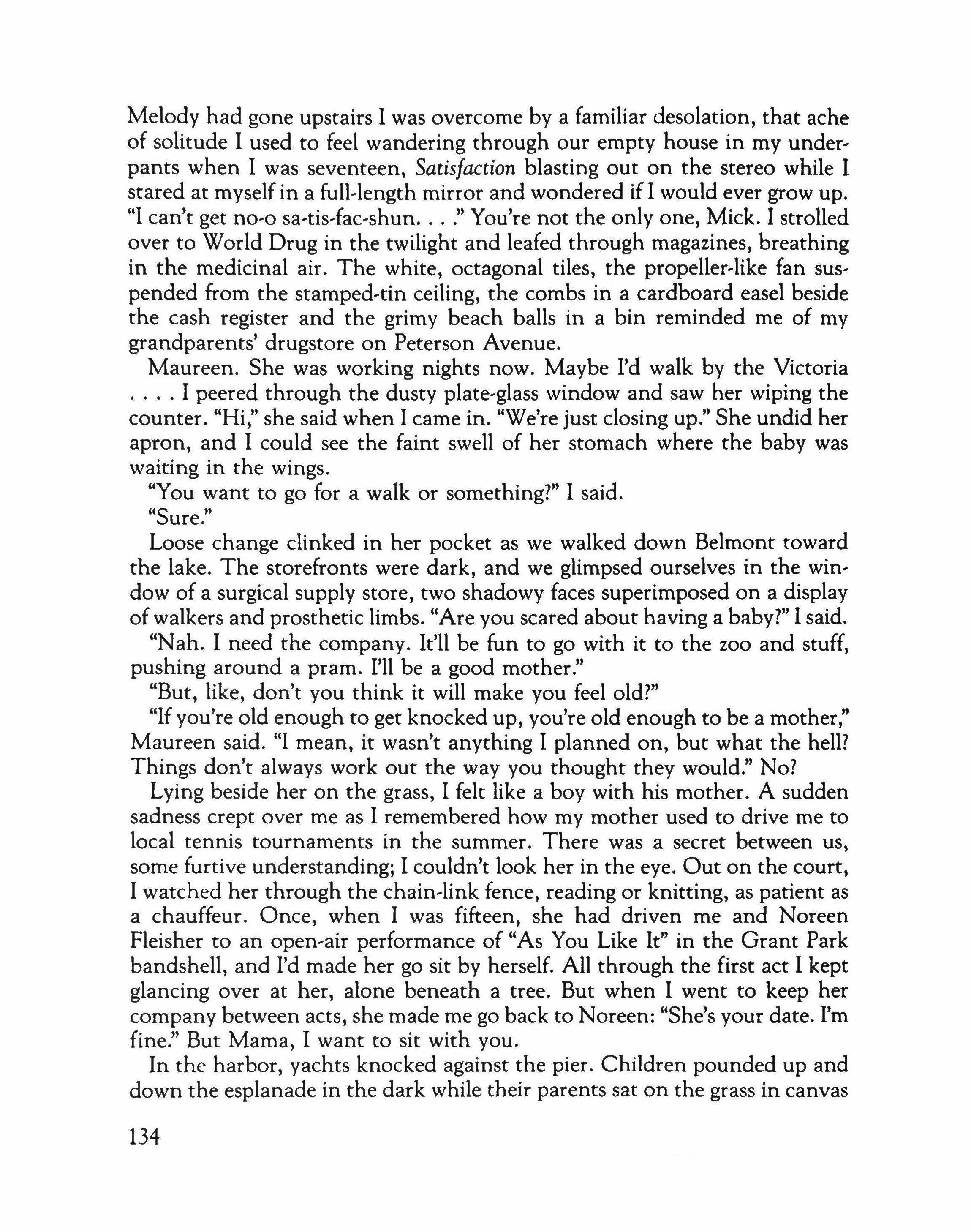
Melody had gone upstairs I was overcome by a familiar desolation, that ache of solitude I used to feel wandering through our empty house in my under, pants when I was seventeen, Satisfaction blasting out on the stereo while I stared at myself in a full-length mirror and wondered if I would ever grow up. "I can't get no-o sa-tis-fac-shun You're not the only one, Mick. I strolled over to World Drug in the twilight and leafed through magazines, breathing in the medicinal air. The white, octagonal tiles, the propeller,like fan sus' pended from the stamped-tin ceiling, the combs in a cardboard easel beside the cash register and the grimy beach balls in a bin reminded me of my grandparents' drugstore on Peterson Avenue.
Maureen. She was working nights now. Maybe I'd walk by the Victoria I peered through the dusty plate-glass window and saw her wiping the counter. "Hi," she said when I came in. "We're just closing up." She undid her apron, and I could see the faint swell of her stomach where the baby was waiting in the wings.
"You want to go for a walk or something?" I said. "Sure."
Loose change clinked in her pocket as we walked down Belmont toward the lake. The storefronts were dark, and we glimpsed ourselves in the win, dow of a surgical supply store, two shadowy faces superimposed on a display ofwalkers and prosthetic limbs. "Are you scared about having a baby?" I said.
"Nah. I need the company. It'll be fun to go with it to the zoo and stuff, pushing around a pram. I'll be a good mother."
"But, like, don't you think it will make you feel old?"
"If you're old enough to get knocked up, you're old enough to be a mother," Maureen said. "I mean, it wasn't anything I planned on, but what the hell? Things don't always work out the way you thought they would." No?
Lying beside her on the grass, I felt like a boy with his mother. A sudden sadness crept over me as I remembered how my mother used to drive me to local tennis tournaments in the summer. There was a secret between us, some furtive understanding; I couldn't look her in the eye. Out on the court, I watched her through the chain,link fence, reading or knitting, as patient as a chauffeur. Once, when I was fifteen, she had driven me and Noreen Fleisher to an open-air performance of "As You Like It" in the Grant Park bandshell, and I'd made her go sit by herself. All through the first act I kept glancing over at her, alone beneath a tree. But when I went to keep her company between acts, she made me go back to Noreen: "She's your date. I'm fine." But Mama, I want to sit with you.
In the harbor, yachts knocked against the pier. Children pounded up and down the esplanade in the dark while their parents sat on the grass in canvas
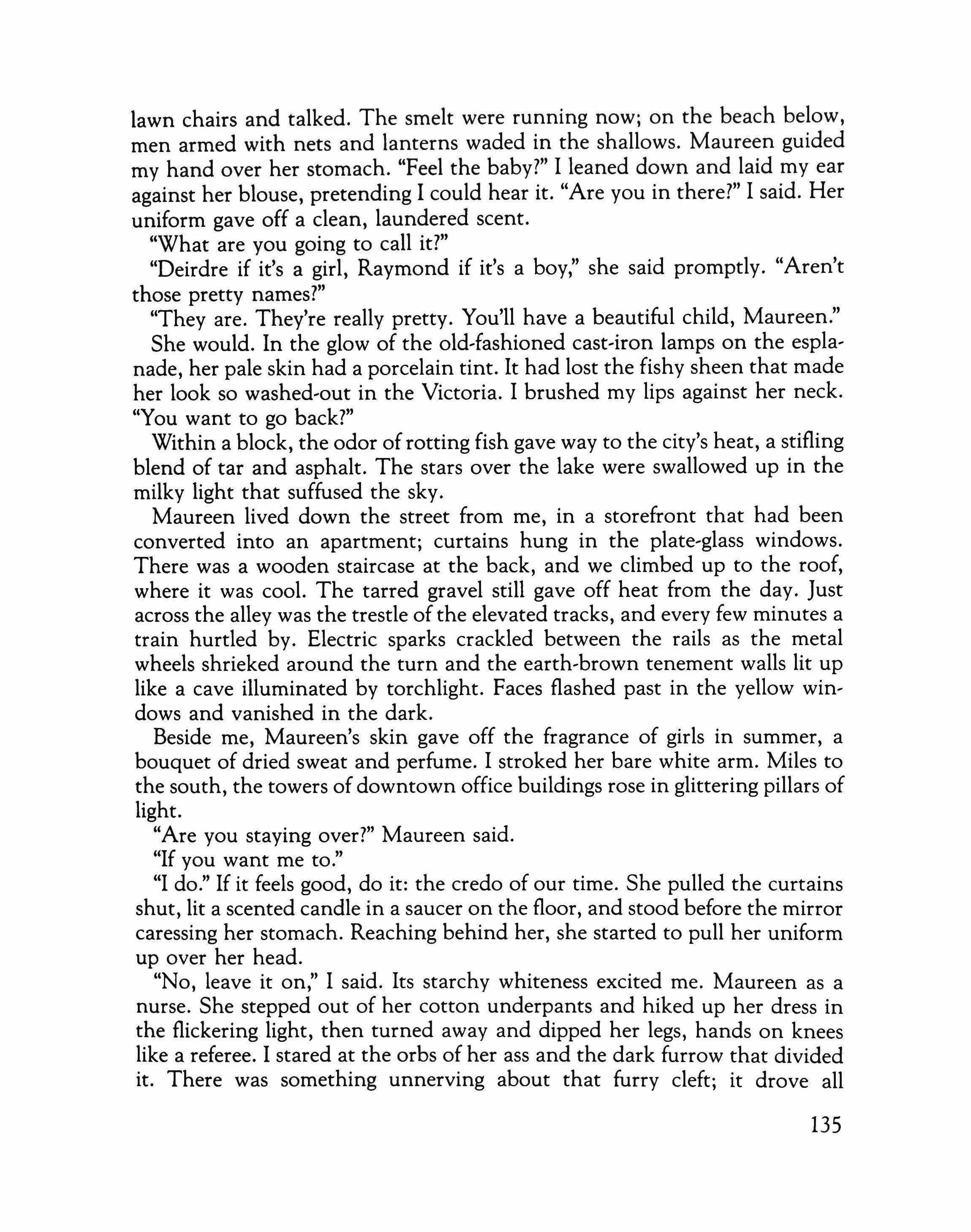
lawn chairs and talked. The smelt were running now; on the beach below, men armed with nets and lanterns waded in the shallows. Maureen guided my hand over her stomach. "Feel the baby?" I leaned down and laid my ear against her blouse, pretending I could hear it. "Are you in there?" I said. Her uniform gave off a clean, laundered scent.
"What are you going to call it?"
"Deirdre if it's a girl, Raymond if it's a boy," she said promptly. "Aren't those pretty names?"
"They are. They're really pretty. You'll have a beautiful child, Maureen."
She would. In the glow of the old-fashioned cast-iron lamps on the esplanade, her pale skin had a porcelain tint. It had lost the fishy sheen that made her look so washed-out in the Victoria. I brushed my lips against her neck.
"You want to go back?"
Within a block, the odor ofrotting fish gave way to the city's heat, a stifling blend of tar and asphalt. The stars over the lake were swallowed up in the milky light that suffused the sky.
Maureen lived down the street from me, in a storefront that had been converted into an apartment; curtains hung in the plate-glass windows. There was a wooden staircase at the back, and we climbed up to the roof, where it was cool. The tarred gravel still gave off heat from the day. Just across the alley was the trestle ofthe elevated tracks, and every few minutes a train hurtled by. Electric sparks crackled between the rails as the metal wheels shrieked around the turn and the earth-brown tenement walls lit up like a cave illuminated by torchlight. Faces flashed past in the yellow windows and vanished in the dark.
Beside me, Maureen's skin gave off the fragrance of girls in summer, a bouquet of dried sweat and perfume. I stroked her bare white arm. Miles to the south, the towers of downtown office buildings rose in glittering pillars of light.
"Are you staying over?" Maureen said.
"If you want me to."
"I do." If it feels good, do it: the credo of our time. She pulled the curtains shut, lit a scented candle in a saucer on the floor, and stood before the mirror caressing her stomach. Reaching behind her, she started to pull her uniform up over her head.
"No, leave it on," I said. Its starchy whiteness excited me. Maureen as a nurse. She stepped out of her cotton underpants and hiked up her dress in the flickering light, then turned away and dipped her legs, hands on knees like a referee. I stared at the orbs of her ass and the dark furrow that divided it. There was something unnerving about that furry cleft; it drove all
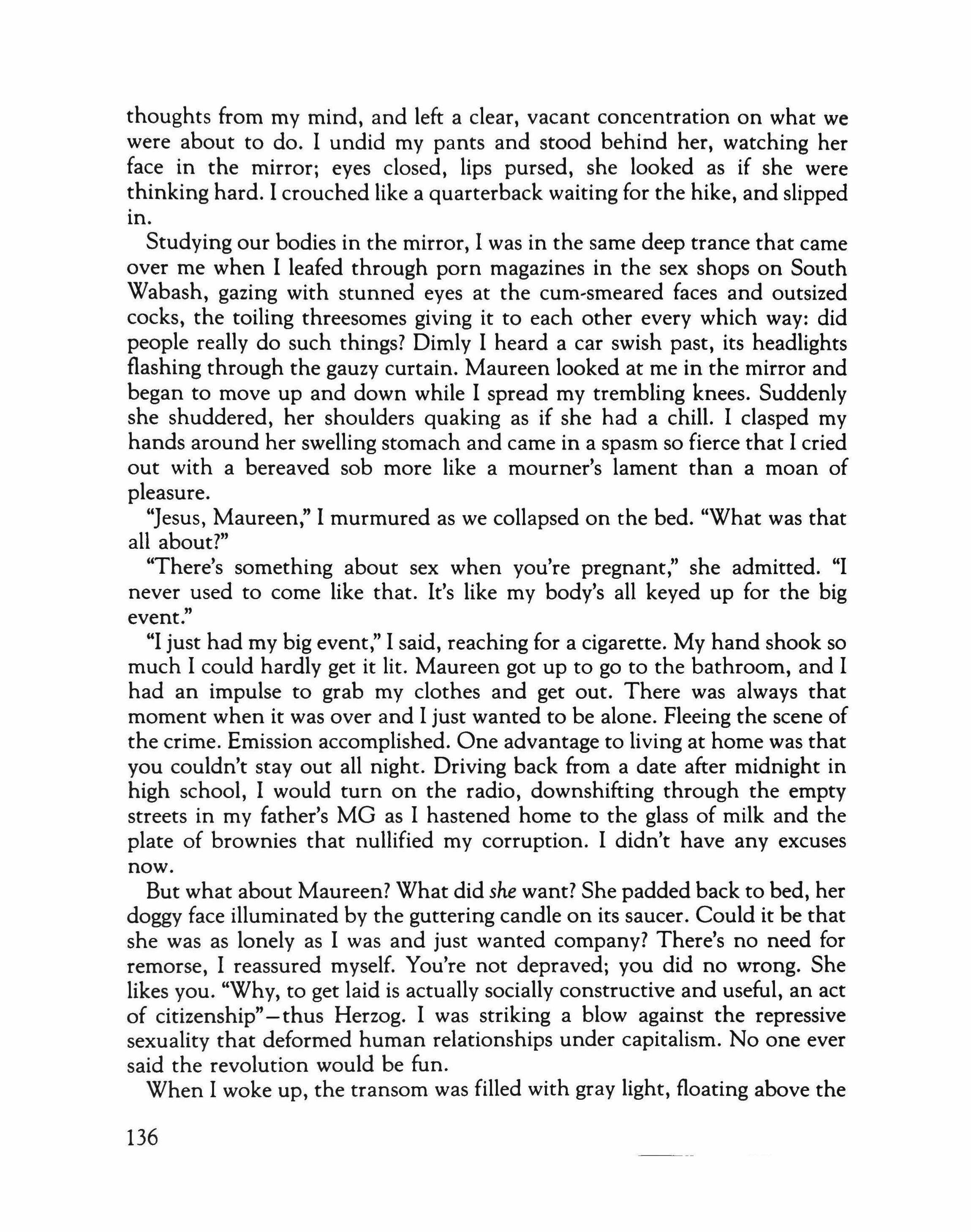
thoughts from my mind, and left a clear, vacant concentration on what we were about to do. I undid my pants and stood behind her, watching her face in the mirror; eyes closed, lips pursed, she looked as if she were thinking hard. I crouched like a quarterback waiting for the hike, and slipped in.
Studying our bodies in the mirror, I was in the same deep trance that came over me when I leafed through porn magazines in the sex shops on South Wabash, gazing with stunned eyes at the cum-smeared faces and outsized cocks, the toiling threesomes giving it to each other every which way: did people really do such things? Dimly I heard a car swish past, its headlights flashing through the gauzy curtain. Maureen looked at me in the mirror and began to move up and down while I spread my trembling knees. Suddenly she shuddered, her shoulders quaking as if she had a chill. I clasped my hands around her swelling stomach and came in a spasm so fierce that I cried out with a bereaved sob more like a mourner's lament than a moan of pleasure.
"Jesus, Maureen," I murmured as we collapsed on the bed. "What was that all about?"
"There's something about sex when you're pregnant," she admitted. "I never used to come like that. It's like my body's all keyed up for the big event."
"I just had my big event," I said, reaching for a cigarette. My hand shook so much I could hardly get it lit. Maureen got up to go to the bathroom, and I had an impulse to grab my clothes and get out. There was always that moment when it was over and I just wanted to be alone. Fleeing the scene of the crime. Emission accomplished. One advantage to living at home was that you couldn't stay out all night. Driving back from a date after midnight in high school, I would turn on the radio, downshifting through the empty streets in my father's MG as I hastened home to the glass of milk and the plate of brownies that nullified my corruption. I didn't have any excuses now.
But what about Maureen? What did she want? She padded back to bed, her doggy face illuminated by the guttering candle on its saucer. Could it be that she was as lonely as I was and just wanted company? There's no need for remorse, I reassured myself. You're not depraved; you did no wrong. She likes you. "Why, to get laid is actually socially constructive and useful, an act of citizenship"-thus Herzog. I was striking a blow against the repressive sexuality that deformed human relationships under capitalism. No one ever said the revolution would be fun.
When I woke up, the transom was filled with gray light, floating above the
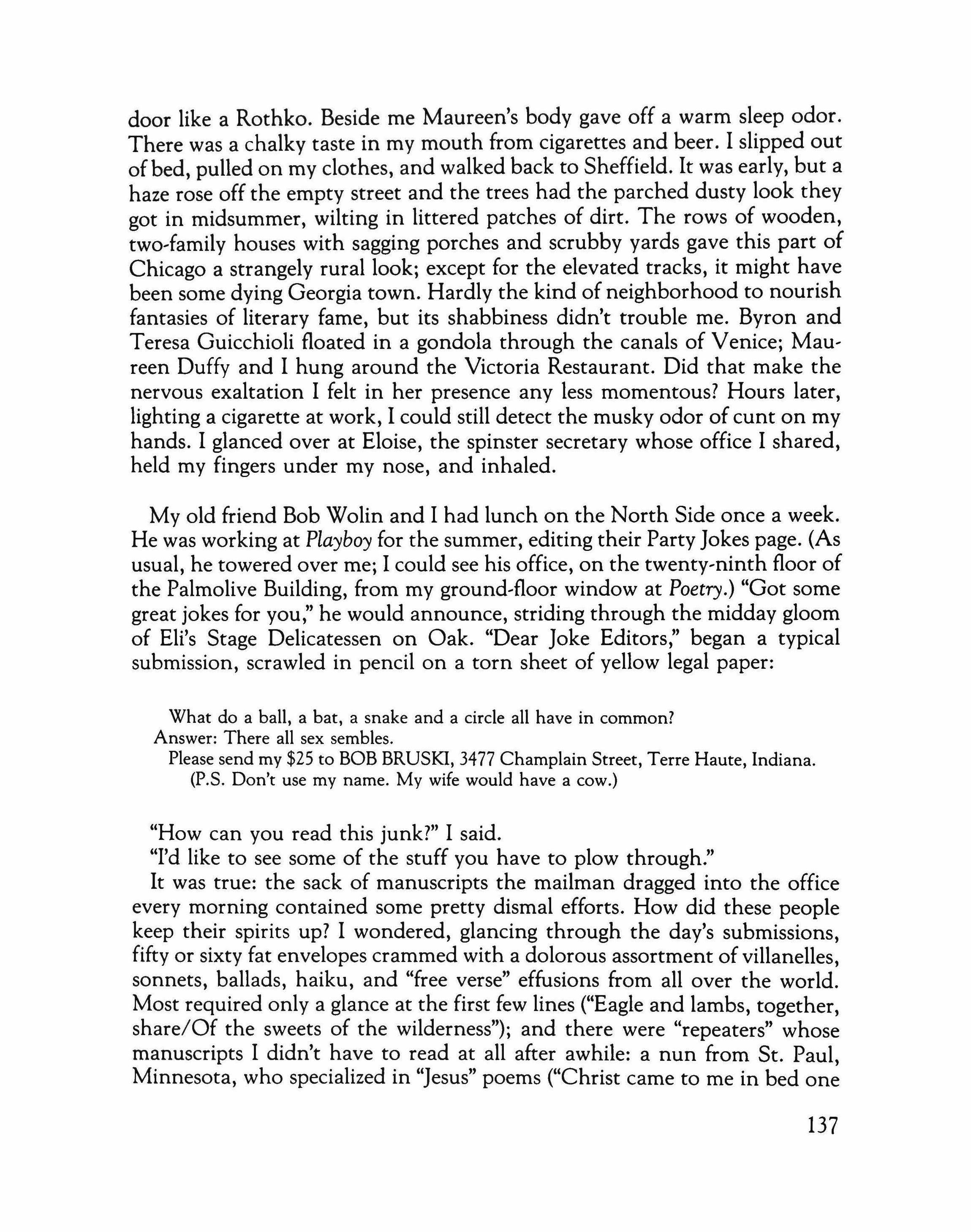
door like a Rothko. Beside me Maureen's body gave off a warm sleep odor. There was a chalky taste in my mouth from cigarettes and beer. I slipped out ofbed, pulled on my clothes, and walked back to Sheffield. It was early, but a haze rose off the empty street and the trees had the parched dusty look they got in midsummer, wilting in littered patches of dirt. The rows of wooden, two-family houses with sagging porches and scrubby yards gave this part of Chicago a strangely rural look; except for the elevated tracks, it might have been some dying Georgia town. Hardly the kind of neighborhood to nourish fantasies of literary fame, but its shabbiness didn't trouble me. Byron and Teresa Guicchioli floated in a gondola through the canals of Venice; Maureen Duffy and I hung around the Victoria Restaurant. Did that make the nervous exaltation I felt in her presence any less momentous? Hours later, lighting a cigarette at work, I could still detect the musky odor of cunt on my hands. I glanced over at Eloise, the spinster secretary whose office I shared, held my fingers under my nose, and inhaled.
Myoid friend Bob Wolin and I had lunch on the North Side once a week. He was working at Playboy for the summer, editing their PartyJokes page. (As usual, he towered over me; I could see his office, on the twenty'ninth floor of the Palmolive Building, from my ground-floor window at Poetry.) "Got some great jokes for you," he would announce, striding through the midday gloom of Eli's Stage Delicatessen on Oak. "Dear Joke Editors," began a typical submission, scrawled in pencil on a torn sheet of yellow legal paper:
What do a ball, a bat, a snake and a circle all have in common?
Answer: There all sex sembles.
Please send my $25 to BOB BRUSKI, 3477 Champlain Street, Terre Haute, Indiana. (P.S. Don't use my name. My wife would have a cow.)
"How can you read this junk?" I said.
"I'd like to see some of the stuff you have to plow through."
It was true: the sack of manuscripts the mailman dragged into the office every morning contained some pretty dismal efforts. How did these people keep their spirits up? I wondered, glancing through the day's submissions, fifty or sixty fat envelopes crammed with a dolorous assortment of villanelles, sonnets, ballads, haiku, and "free verse" effusions from all over the world. Most required only a glance at the first few lines ("Eagle and lambs, together, share/Of the sweets of the wilderness"); and there were "repeaters" whose manuscripts I didn't have to read at all after awhile: a nun from St. Paul, Minnesota, who specialized in "Jesus" poems {"Christ came to me in bed one

night/His head with a crown of thorns bedight"}; Louis Ginsberg, a retired New Jersey schoolteacher, who was Allen Ginsberg's father; the inmate of a mental institution in Upstate New York, who covered yellow legal sheets with an illegible scrawl; and Bejan J. Daruwalla, a poet from Bombay, who submitted many versions of his "Apostrophe to a Nihilist" in the hope of "getting it right":
If always you are looking For items to pick at, Or objects and people to hurtle a brick at, You are sure to find NOTHING For which to thank heaven No matter what fabulous Fortune is given. And would you persist In this line if you knew That it will wreck everything, Including YOU?
If these people had only known that their submissions were doomed to languish in a file cabinet for six weeks before they were sent back - a policy designed to discourage eager poets from inundating us with manuscripts. I usually came across two or three poems in each mail that required further attention, either because they were by contributors to the magazine or had possibilities; the rest got a rejection slip. Stuffing the manuscripts back in their stamped, self-addressed envelopes, I felt sorry for the authors and couldn't resist scrawling a few words of encouragement on their slips: ''Try us again" or "You have a feel for words." But these consoling messages only provoked more thick envelopes. "I don't know who you are," wrote a court stenographer from Flint, Michigan, "but yours are the first personal words I've received from an editor in twenty-seven years. I wonder if you would mind reading my novel, 0 Bloody Land." Enclosed was a 300�page manuscript, the pages faded to parchment yellow. I read the first two sentences: "Abe Lincoln leaned forward in his chair and buried his face in his hands. 'By God, Mary,' he cried, 'I'll see the slaves freed if it's the last thing I ever do.'
One day Bob came in to Eli's and handed me a new poem: "One of the few sonnets ever written in the bleachers at Comiskey Park." I pushed aside a plate of borscht and laid it on the table.
I sit in the bleachers among a chanting crowd, My eyes stunned by the emerald lawn.
High above the upper deck, night lights
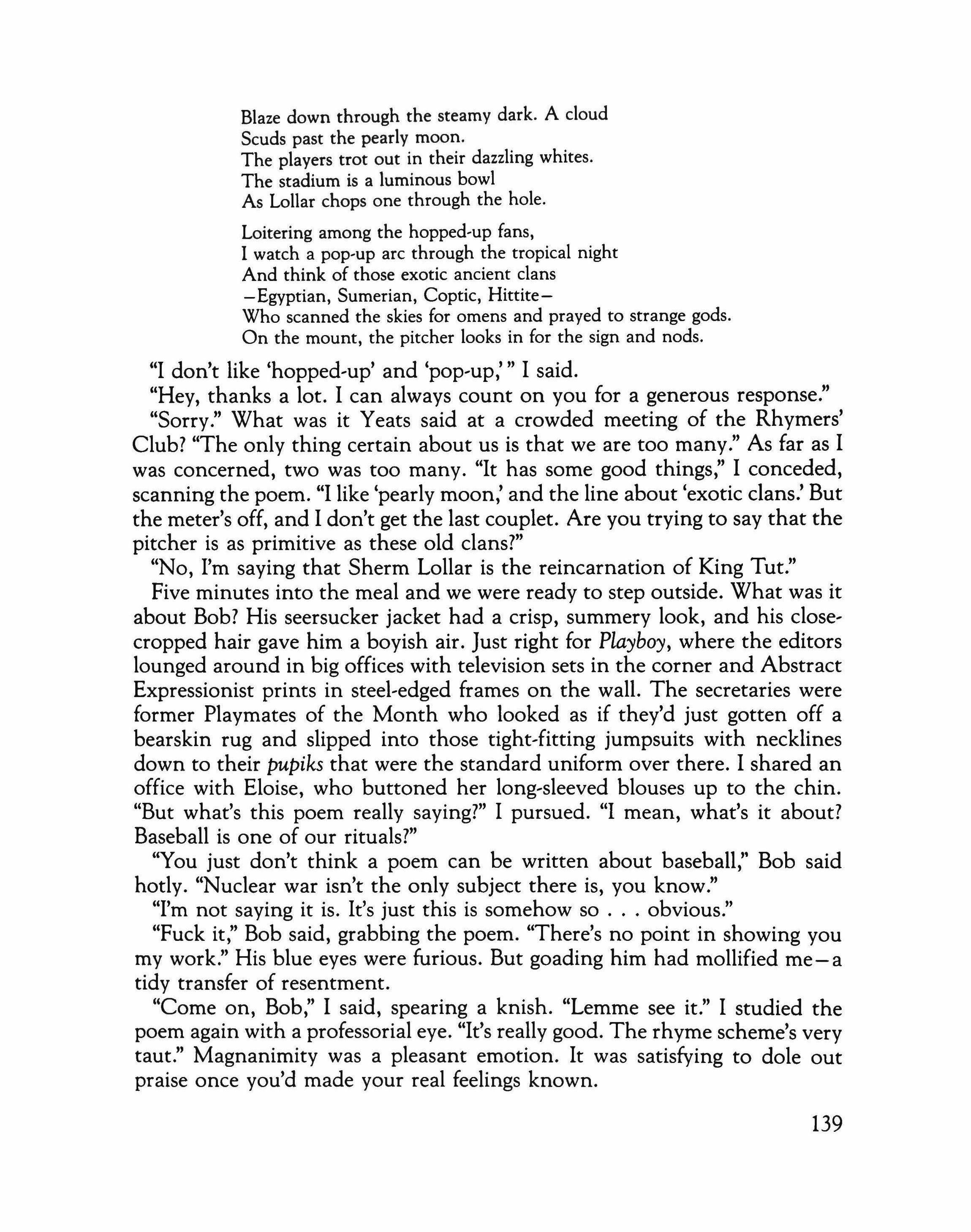
Blaze down through the steamy dark. A cloud Scuds past the pearly moon.
The players trot out in their dazzling whites. The stadium is a luminous bowl
As Lollar chops one through the hole.
Loitering among the hopped-up fans, I watch a pop-up arc through the tropical night And think of those exotic ancient clans -Egyptian, Sumerian, Coptic, HittiteWho scanned the skies for omens and prayed to strange gods. On the mount, the pitcher looks in for the sign and nods.
"I don't like 'hopped-up' and 'pop,up,'" I said.
"Hey, thanks a lot. I can always count on you for a generous response."
"Sorry." What was it Yeats said at a crowded meeting of the Rhymers' Club? "The only thing certain about us is that we are too many." As far as I was concerned, two was too many. "It has some good things," I conceded, scanning the poem. "I like 'pearly moon,' and the line about 'exotic clans.' But the meter's off, and I don't get the last couplet. Are you trying to say that the pitcher is as primitive as these old clans?"
"No, I'm saying that Sherm Lollar is the reincarnation of King Tut."
Five minutes into the meal and we were ready to step outside. What was it about Bob? His seersucker jacket had a crisp, summery look, and his close, cropped hair gave him a boyish air. Just right for Playboy, where the editors lounged around in big offices with television sets in the corner and Abstract Expressionist prints in steel-edged frames on the wall. The secretaries were former Playmates of the Month who looked as if they'd just gotten off a bearskin rug and slipped into those tight-fitting jumpsuits with necklines down to their pupiks that were the standard uniform over there. I shared an office with Eloise, who buttoned her long-sleeved blouses up to the chin. "But what's this poem really saying?" I pursued. "I mean, what's it about? Baseball is one of our rituals?"
"You just don't think a poem can be written about baseball," Bob said hotly. "Nuclear war isn't the only subject there is, you know."
"I'm not saying it is. It's just this is somehow so obvious."
"Fuck it:' Bob said, grabbing the poem. "There's no point in showing you my work." His blue eyes were furious. But goading him had mollified me-a tidy transfer of resentment.
"Come on, Bob," I said, spearing a knish. "Lemme see it." I studied the poem again with a professorial eye. "It's really good. The rhyme scheme's very taut." Magnanimity was a pleasant emotion. It was satisfying to dole out praise once you'd made your real feelings known.
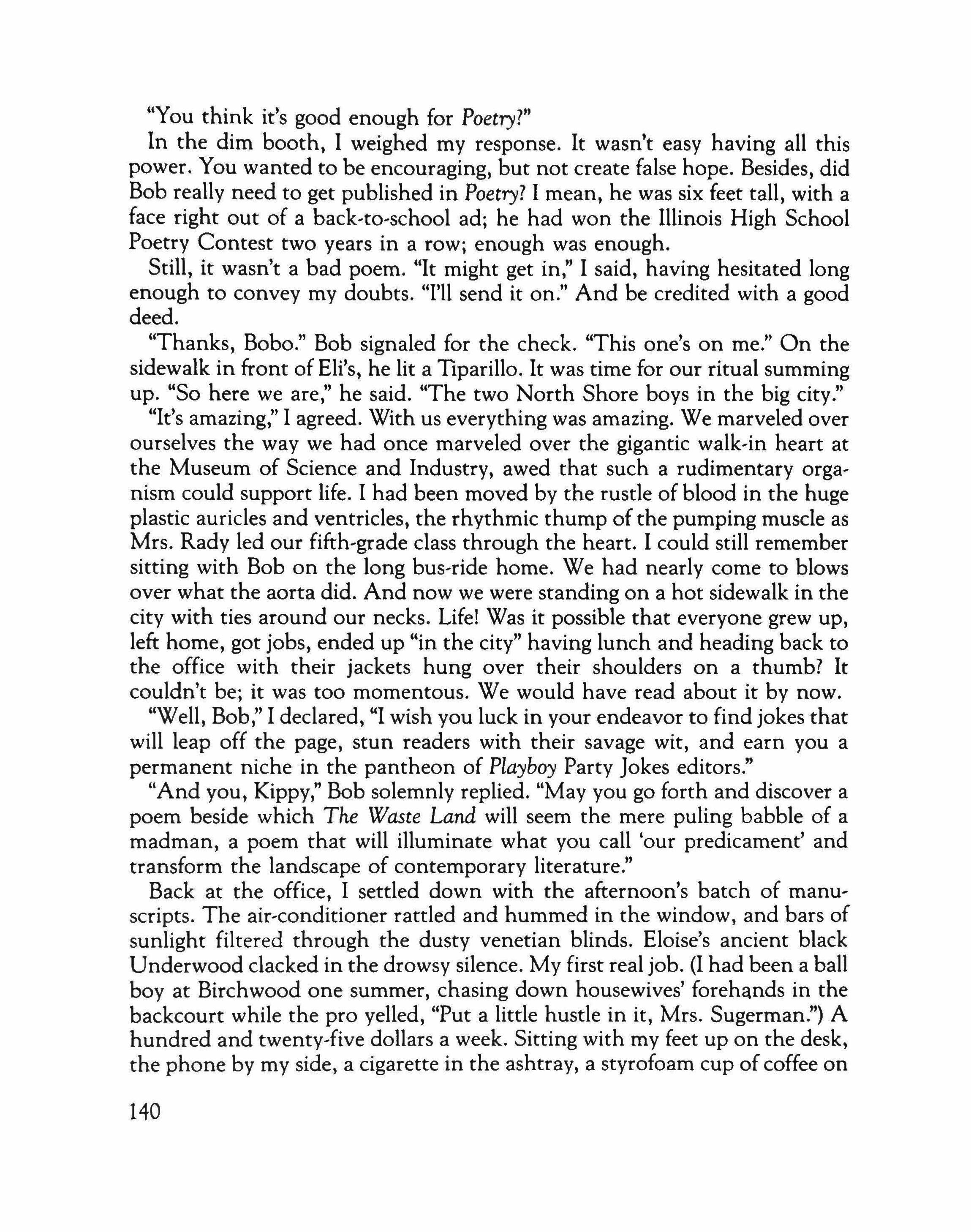
"You think it's good enough for Poetry?"
In the dim booth, I weighed my response. It wasn't easy having all this power. You wanted to be encouraging, but not create false hope. Besides, did Bob really need to get published in Poetry? I mean, he was six feet tall, with a face right out of a back-to-school ad; he had won the Illinois High School Poetry Contest two years in a row; enough was enough.
Still, it wasn't a bad poem. "It might get in," I said, having hesitated long enough to convey my doubts. "I'll send it on." And be credited with a good deed.
"Thanks, Bobo." Bob signaled for the check. "This one's on me." On the sidewalk in front of Eli's, he lit a Tiparillo, It was time for our ritual summing up. "So here we are," he said. "The two North Shore boys in the big city."
"It's amazing;' I agreed. With us everything was amazing. We marveled over ourselves the way we had once marveled over the gigantic walk-in heart at the Museum of Science and Industry, awed that such a rudimentary organism could support life. I had been moved by the rustle of blood in the huge plastic auricles and ventricles, the rhythmic thump of the pumping muscle as Mrs. Rady led our fifth-grade class through the heart. I could still remember sitting with Bob on the long bus-ride home. We had nearly come to blows over what the aorta did. And now we were standing on a hot sidewalk in the city with ties around our necks. Life! Was it possible that everyone grew up, left home, got jobs, ended up "in the city" having lunch and heading back to the office with their jackets hung over their shoulders on a thumb? It couldn't be; it was too momentous. We would have read about it by now.
"Well, Bob," I declared, "I wish you luck in your endeavor to find jokes that will leap off the page, stun readers with their savage wit, and earn you a permanent niche in the pantheon of Playboy Party Jokes editors."
"And you, Kippy," Bob solemnly replied. "May you go forth and discover a poem beside which The Waste Land will seem the mere puling babble of a madman, a poem that will illuminate what you call 'our predicament' and transform the landscape of contemporary literature."
Back at the office, I settled down with the afternoon's batch of manu, scripts. The air-conditioner rattled and hummed in the window, and bars of sunlight filtered through the dusty venetian blinds. Eloise's ancient black Underwood clacked in the drowsy silence. My first real job. (I had been a ball boy at Birchwood one summer, chasing down housewives' forehands in the backcourt while the pro yelled, "Put a little hustle in it, Mrs. Sugerman.") A hundred and twenty-five dollars a week. Sitting with my feet up on the desk, the phone by my side, a cigarette in the ashtray, a styrofoam cup of coffee on

the desk and a stack of bad poems within easy reach, I was happy. I had a good life.
Toward the end of the afternoon, Derek Holmes, the editor of Poetry, phoned from down the hall, summoning me for our daily conference. A bachelor near retirement, he came to work in sandals and bermuda shorts, smoked Gitanes and kept a bottle of Cinzano in his office; he had once done a year of graduate work at the Sorbonne. "What is it now, dear boy?" he would say in his coquettish voice whenever I came in, the phone tucked under his chin like a cello-then, to one of the friends he gossiped with all day: "Could you hold on for one minute, Richard? The boy has just walked in."
Derek had published a couple of my poems, but he was capricious about it. One day he would deliver a crushing remark - "These are rather silly, I'm afraid:' or "These are third-rate Lowell" - then turn around and accept some long-winded monologue I had put in the mouth of a dead Bulgarian poet. One afternoon he shuffled down the hall with a fat new biography of Hart Crane in hand and asked if I was "at all interested" in reviewing it. "Shall we say a thousand words?" That whole afternoon I was too excited to read.
Leafing through the glossy new book, I glanced at the illustrations, the author's photograph, the promotional letter, the printed slip listing the price and publication date. They gave it authority: whoever owned this book hadn't just gone out and bought it, but had a special purpose, a mandate to "review" it. For weeks afterward I left the fat biography on the card table with the reviewer's slip sticking out so Herbert could see it.
"Any new finds today?" Derek said when I came in for our daily conference. He put his bony feet up on the desk. "I'm afraid we'll have to pass on these." He handed me a sheaf of poemsamong them one of my dramatic mono, logue "Kafka's Prayer."
How could he not like it? I brooded on my way back down the hall. Spoken by Kafka as he lay dying in a Swiss sanatorium, it engaged the big themes: the collapse of Europe, the holocaust, the pathos of the writer's life. The last stanza, where Kafka atones for the vitriolic "Letter to His Father:' was especially good:
What I needed, father, you could never give. You made me the invalid I became. But now we both need to forgive, Or endure the memory of our shame.
What was the matter with Derek, anyway? Slumping down in my wooden swivel chair, I noticed Bob's poem on the desk. "Night Game." I looked out

the window for awhile, listening to the bleat of traffic on Rush Street. Then I slipped the poem in an envelope, tucked in a rejection slip, and dropped it in Eloise's OUT box. Why make him wait six weeks?
During the last weeks of August, the Sun,Times was full of accounts of the Democratic Convention that was to be held in Chicago and the Yippies who were converging to disrupt it. While Herbert sat at the card table making his way through Kropotkin and Althusser, I lounged on the front steps reading about Jerry Rubin's plot to release a bunch of pigs on the streets of Chicago. Mayor Daley had refused the demonstrators a permit to sleep in Lincoln Park, and it looked like there might be trouble. One steamy night I decided to walk over and see what was happening. "You're wasting your time," Her, bert said, looking up from his book. "They're just a bunch of suburban kids playing at revolution."
"Come on, Herbert," I protested. "Things are really heating up out there. I'm sick of Capital. I want some action." I laced up my Keds ("Wear shoes you can run in," my mother had advised me over the phone. "I don't want those policemen getting you in their clutches") and stuffed a paperback copy ofThe Liberal Imagination in my hip pocket. "It'll be an experience."
"You know what Kafka says about experience?"
It's on the tip of my tongue. "No, what does he say?"
"It's like a seasickness on dry land." But he was putting on his windbreaker. In his white short-sleeved shirt, brown polyester slacks, and scuffed priest's shoes he looked like a 1930s Communist, one of those gaunt union organizers who stood shivering at the gates of factories in the dawn, handing out leaflets.
It was dusk when we got to the park. The sky over the lake was deep lavender, and the air had a warm, grassy fragrance. Beneath the leafy elms thousands of demonstrators were camped out on blankets or wandering around in second,hand Army jackets, Tehirrs, Civil War caps, headbands, cowboy hats, bandannas, work shirts, dungarees, blue jeans, sandals, boots, shawls, capes - more ragged than the troops routed at Antietam. Fires smoldered in trash cans and columns of sparks rose through the trees. The faces of the demonstrators shone in the flaring light with a Goya-like intensity. The damp air was perfumed with dope.
It was nearly ten, the curfew stipulated by the police, and the crowd in Lincoln Park had begun to mill about uncertainly. A group of black-clad priests near the platform raised up a giant cross and other people were busy making a barricade of garbage cans and picnic benches. I spotted Allen Ginsberg, Jean Genet, and William Burroughs under a tree. Ginsberg's patri-
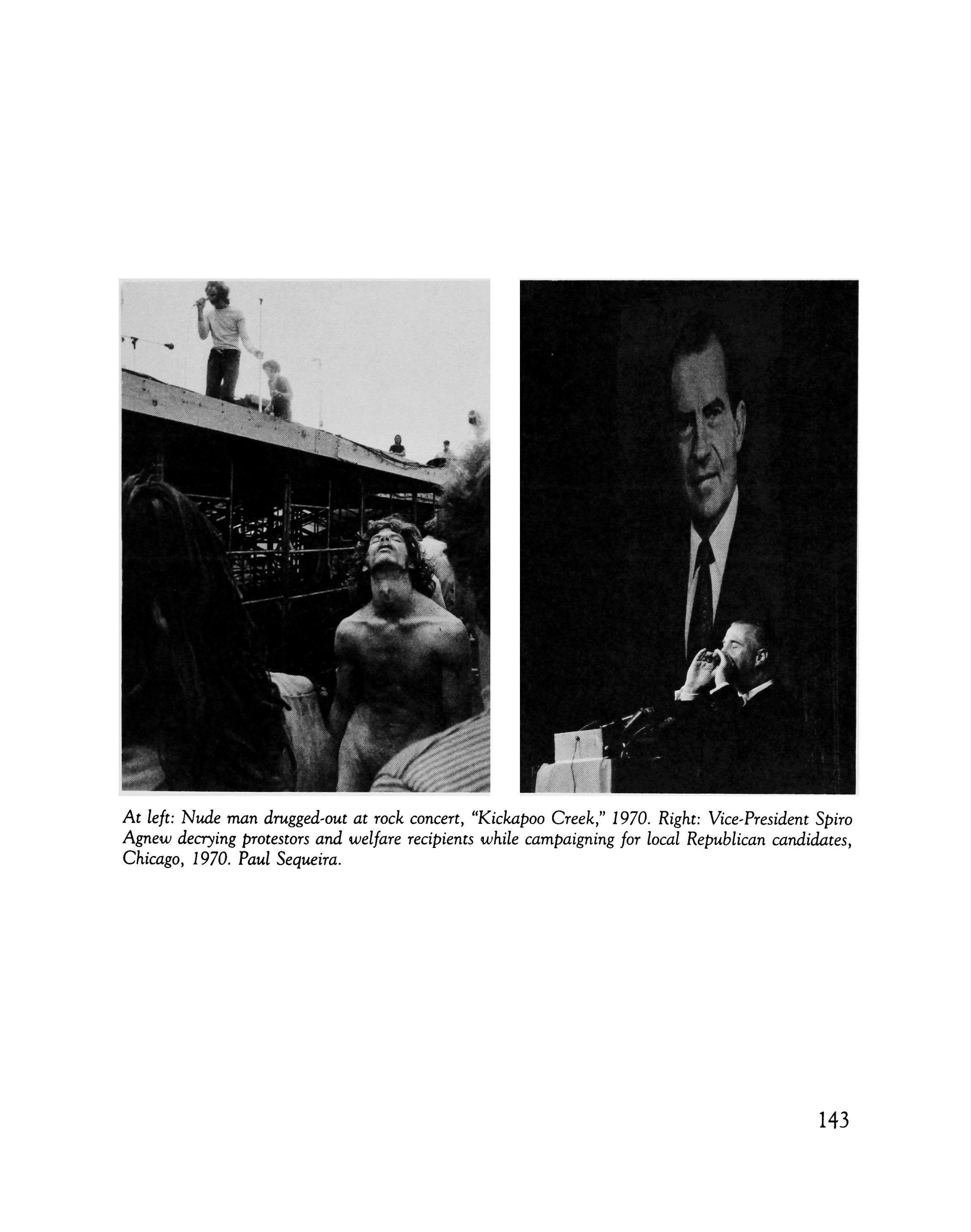
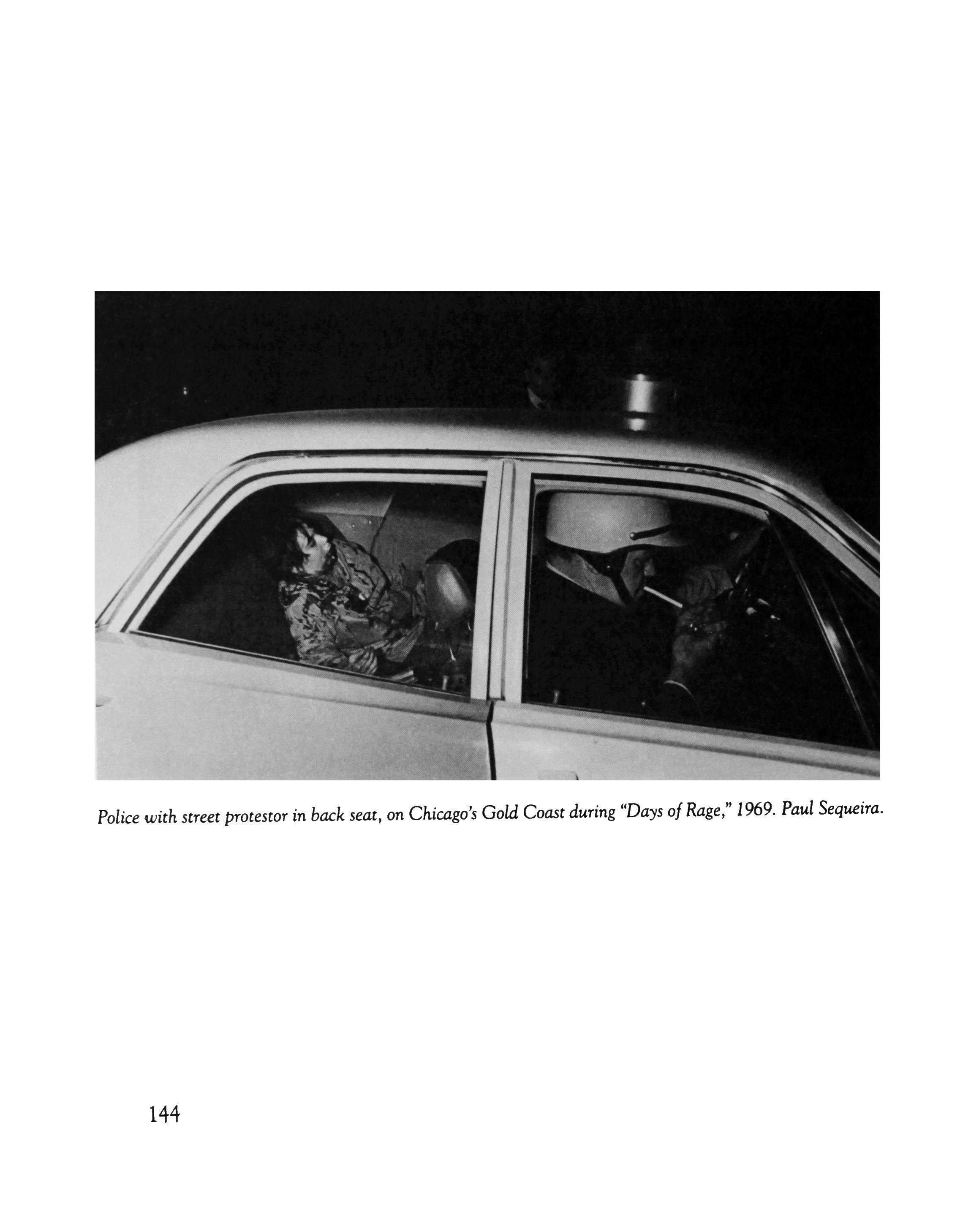

archal beard flowed down his face and he was nearly bald, but he had the brainy look of a high-school math wizard. Genet wore khaki slacks and huaraches. His forehead was wrinkled like a rotting fruit. Burroughs had a gaunt, papery face, and his gray suit needed pressing.
A girl who had been talking to the trio of writers walked away. Now was my chance. "Mr. Ginsberg?"
The burly poet glanced my way "Yeah?"
"Urn, I just wanted to tell you how much I admired Howl. It's really a great poem."
"I suppose you're a poet?" His voice was angry, bored, a basso rasp.
"Well, I don't know about that. But I do write poetry."
"Qu'est,ce qu'il dit?" It was Genet, gazing at me with moist eyes full of tenderness.
"Un poete," Ginsberg said shortly.
<Ill est beau," Genet murmured. He gave me an adoring look and reached up to stroke my hair.
Just then a boy raced up and yelled, "They're coming, man, the pigs are coming!" A herd of demonstrators pounded by. "I don't feel like getting my ass whipped:' Ginsberg said. "Let's get out of here." The writers trotted off beneath the trees, and I trotted beside them for a few yards, but they didn't notice me-except Genet, who waved at me with a tiny hand as they hurried away in the dark.
Spotlights swept through the fog of tear gas and cast a marshy glare over the scene. I could hear glass shattering on Lincoln Avenue and, close by, the pop of tear-gas canisters. My heart skipped with fear. "How do we get out of here?" I yelled to Herbert.
"I guess we don't," he said.
Just then a squad car's beacon flashed through the trees and a wedge of cops charged over the knoll. "Don't run! Don't run!" people chanted as they sprinted by. Suddenly the tear gas hit me. My eyes winced shut, my throat burned, my face stung as if it had been swabbed with ammonia. I stumbled forward, lost sight of Herbert, and slipped on the wet grass. There were cries and groans in the darkness, and the hollow thud of nightsticks. My lungs were on fire as I raced the last few hundred yards to the edge of the park.
Herbert was leaning against the hood of my mother's Oldsmobile, holding a handkerchief over his face. "I thought I'd never find you!" I shouted over the whoop of sirens and the crunch of tires kicking up gravel as cars skidded out of the parking lot. I fumbled for the key, flung open the passenger door, and we lurched forward through the swarm of cars heading away from the
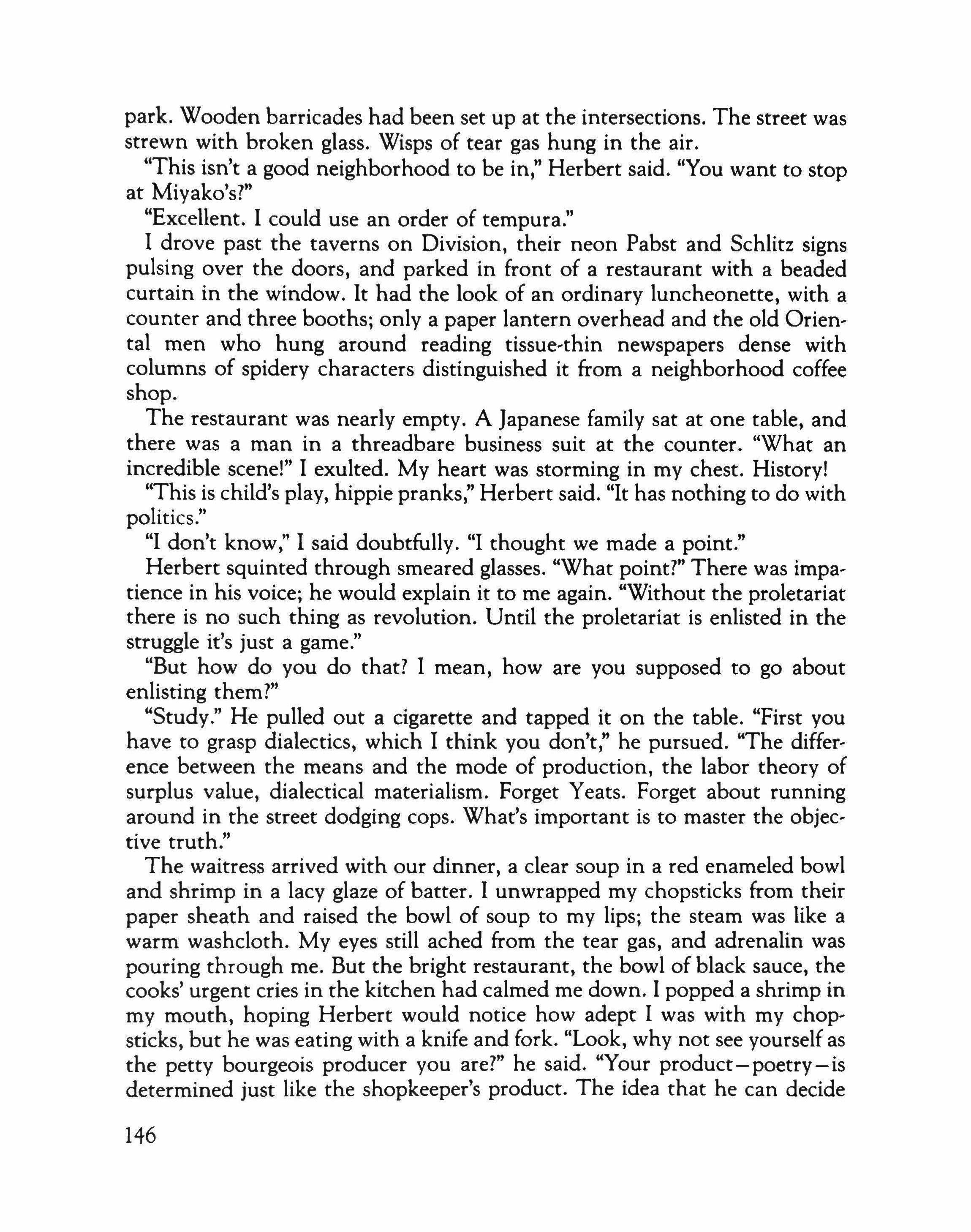
park. Wooden barricades had been set up at the intersections. The street was strewn with broken glass. Wisps of tear gas hung in the air.
"This isn't a good neighborhood to be in," Herbert said. "You want to stop at Miyako's?"
"Excellent. I could use an order of tempura."
I drove past the taverns on Division, their neon Pabst and Schlitz signs pulsing over the doors, and parked in front of a restaurant with a beaded curtain in the window. It had the look of an ordinary luncheonette, with a counter and three booths; only a paper lantern overhead and the old Oriental men who hung around reading tissue-thin newspapers dense with columns of spidery characters distinguished it from a neighborhood coffee shop.
The restaurant was nearly empty. A Japanese family sat at one table, and there was a man in a threadbare business suit at the counter. "What an incredible scene!" I exulted. My heart was storming in my chest. History!
"This is child's play, hippie pranks," Herbert said. "It has nothing to do with politics."
"I don't know," I said doubtfully. "I thought we made a point."
Herbert squinted through smeared glasses. "What point?" There was impatience in his voice; he would explain it to me again. "Without the proletariat there is no such thing as revolution. Until the proletariat is enlisted in the struggle it's just a game."
"But how do you do that? I mean, how are you supposed to go about enlisting them?"
"Study." He pulled out a cigarette and tapped it on the table. "First you have to grasp dialectics, which I think you don't," he pursued. "The differ, ence between the means and the mode of production, the labor theory of surplus value, dialectical materialism. Forget Yeats. Forget about running around in the street dodging cops. What's important is to master the objechIt nve trut
The waitress arrived with our dinner, a clear soup in a red enameled bowl and shrimp in a lacy glaze of batter. I unwrapped my chopsticks from their paper sheath and raised the bowl of soup to my lips; the steam was like a warm washcloth. My eyes still ached from the tear gas, and adrenalin was pouring through me. But the bright restaurant, the bowl of black sauce, the cooks' urgent cries in the kitchen had calmed me down. I popped a shrimp in my mouth, hoping Herbert would notice how adept I was with my chop, sticks, but he was eating with a knife and fork. "Look, why not see yourself as the petty bourgeois producer you are?" he said. "Your product - poetry - is determined just like the shopkeeper's product. The idea that he can decide
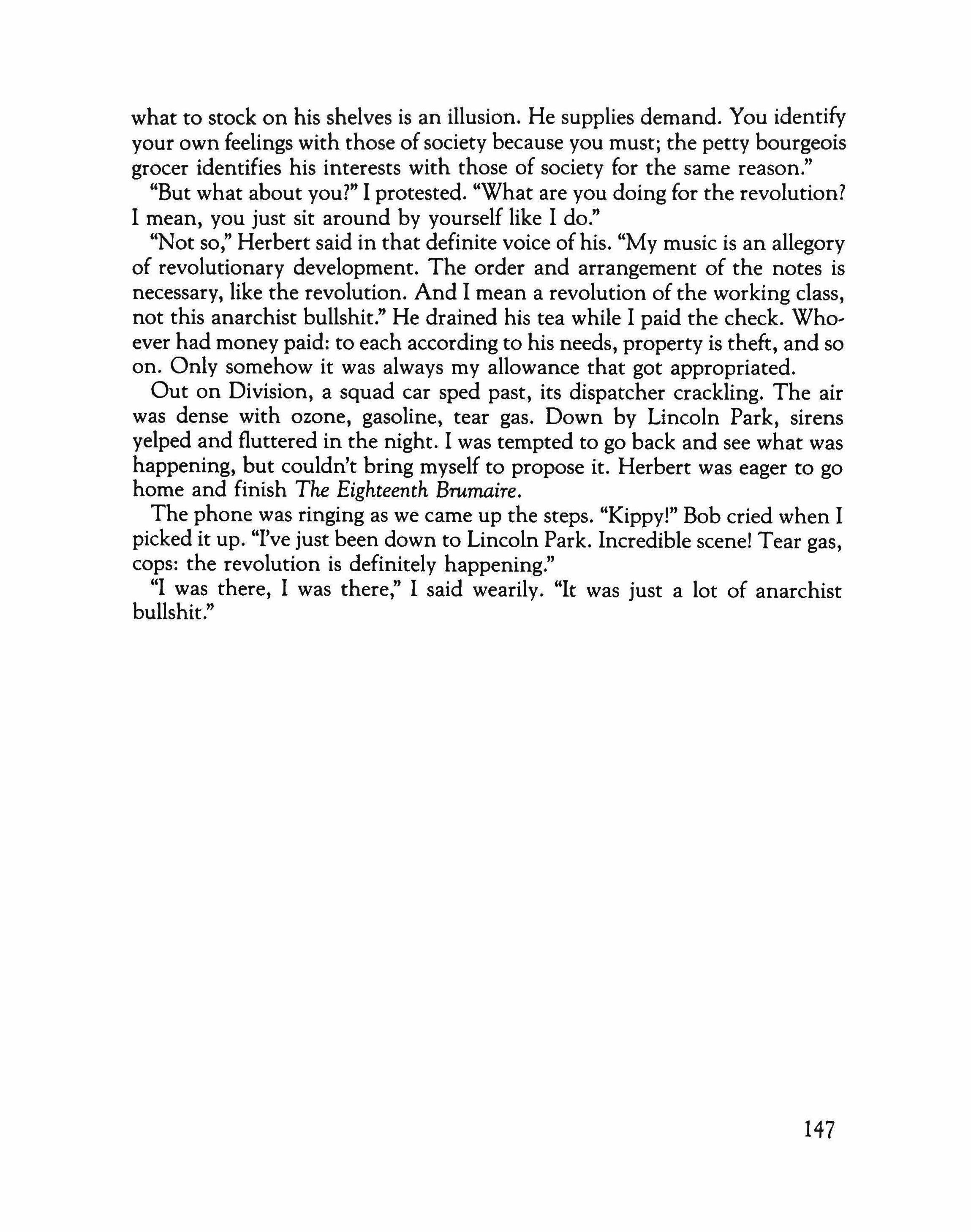
what to stock on his shelves is an illusion. He supplies demand. You identify your own feelings with those of society because you must; the petty bourgeois grocer identifies his interests with those of society for the same reason."
"But what about you?" I protested. "What are you doing for the revolution? I mean, you just sit around by yourself like I do."
"Not so," Herbert said in that definite voice of his. "My music is an allegory of revolutionary development. The order and arrangement of the notes is necessary, like the revolution. And I mean a revolution of the working class, not this anarchist bullshit." He drained his tea while I paid the check. Who, ever had money paid: to each according to his needs, property is theft, and so on. Only somehow it was always my allowance that got appropriated.
Out on Division, a squad car sped past, its dispatcher crackling. The air was dense with ozone, gasoline, tear gas. Down by Lincoln Park, sirens yelped and fluttered in the night. I was tempted to go back and see what was happening, but couldn't bring myself to propose it. Herbert was eager to go home and finish The Eighteenth Brumaire.
The phone was ringing as we came up the steps. "Kippy!" Bob cried when I picked it up. "I've just been down to Lincoln Park. Incredible scene! Tear gas, cops: the revolution is definitely happening."
"I was there, I was there:' I said wearily. "It was just a lot of anarchist bullshit,"

It falls. It falls and it falls and it falls and that's Chicago winter. A hooker in fake mink plumping her hunched-up shoulders faces the wind with the massive stoicism of a buffalo on the storm-beat plains. Though she's lasted longer. An institution: she may as well be stamped on American coins. She waves-it's an ambulance
going as slow as a circling john, the ice that bad. And which-this weather, this man on his way to the cardiac ward - will outlast the other is hard to tell. Because it's Christmas Eve my TV weatherman, a dollop sloshed like most of us, predicts tomorrow as "tropical" then smiles-a joke, a comfort, and a wish. It won't save anyone but
wants to. I remember my childhood rabbi warning Sunday School to mouth but not give voice to "pagan" (Christmas) songs in public school. To him, those silent zeroes we'd be percolating up were needed bogusness that saved. They come from where orgasm's faked or assurances given a patient in hopeless pain. Of course I've said such things. We've all been meteorologists
in hospital rooms and risked the kind prediction - maybe thought of it as invocation, priming heavenly balm down, as with any pump: by long dry imitation.

I know plenty of jokes about dry pumping and most have to do with this whore. It's midnight now and snow along the fake mink gives her folded wings. Some guy will call her angel. White lie, white lie, it falls and it falls. We say "a blanket." We say "good night."
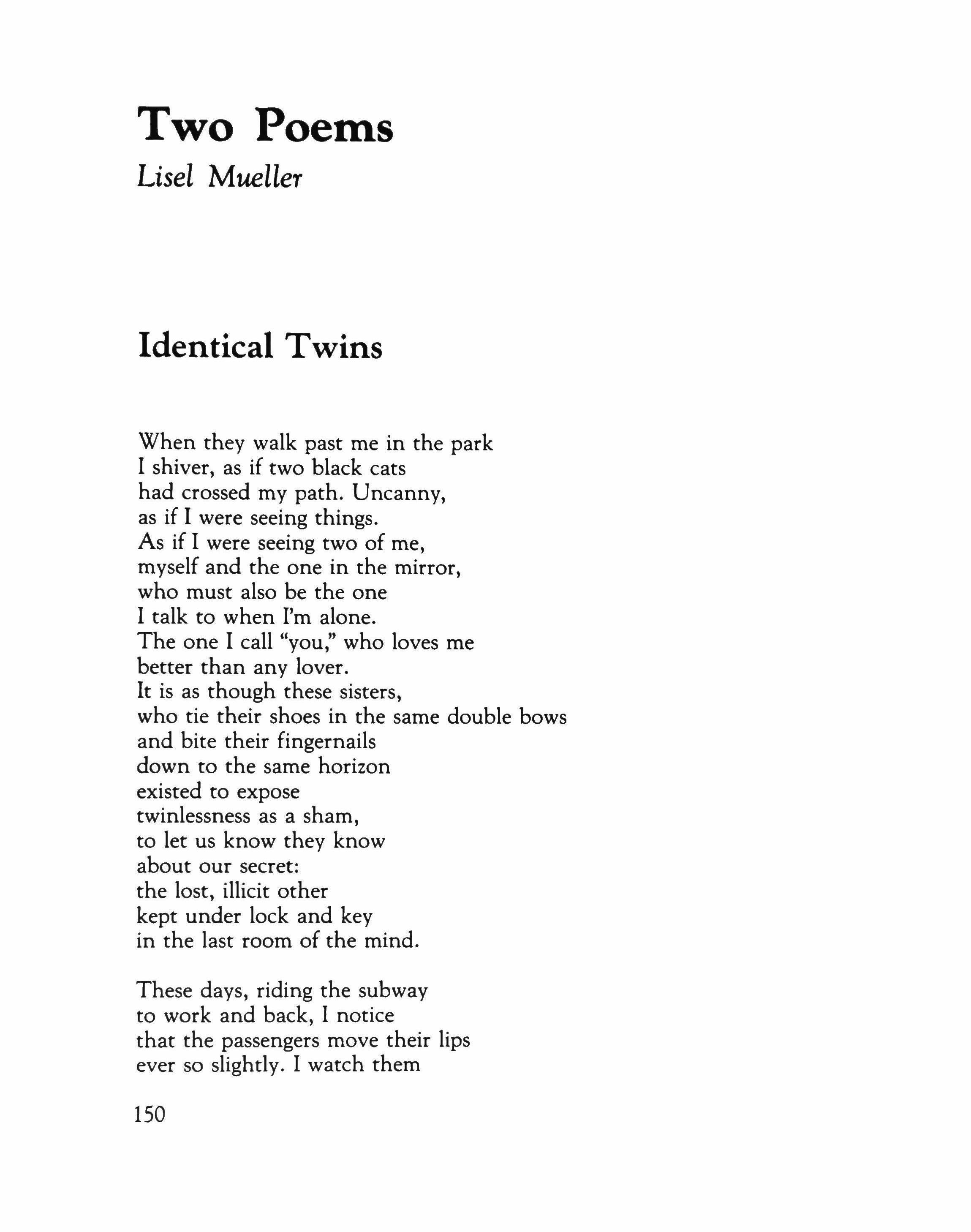
When they walk past me in the park I shiver, as if two black cats had crossed my path. Uncanny, as if I were seeing things. As if I were seeing two of me, myself and the one in the mirror, who must also be the one I talk to when I'm alone. The one I call "you," who loves me better than any lover. It is as though these sisters, who tie their shoes in the same double bows and bite their fingernails down to the same horizon existed to expose twinlessness as a sham, to let us know they know about our secret: the lost, illicit other kept under lock and key in the last room of the mind.
These days, riding the subway to work and back, I notice that the passengers move their lips ever so slightly. I watch them

lean into themselves as if toward a voice, and then turn to the window to search the backlit face in the black, speeding mirror.

1
A man I know named Booker runs a second-hand bookstore. My florist's name is Fiore. Formica designs kitchens in California, and Richard Hazard sells real estate and insurance. We can change our names or grow into them.
2 Except the unlucky ones. Even their murderers knew the children of the Czar were innocent. But they could not kill the name Romanoff without killing its bearers.
3
Today, in the hospital nursery, I visit Grace, asleep under a pink blanket, her hands still curled into shells. She lies between Tiffany and Marvella, who soon must wear the heavy crowns of their names. Her mother named her Grace in spite of her red skin and her head like an egg. She likes the old-fashioned sound. "Give her time to fulfill the promise," she says.
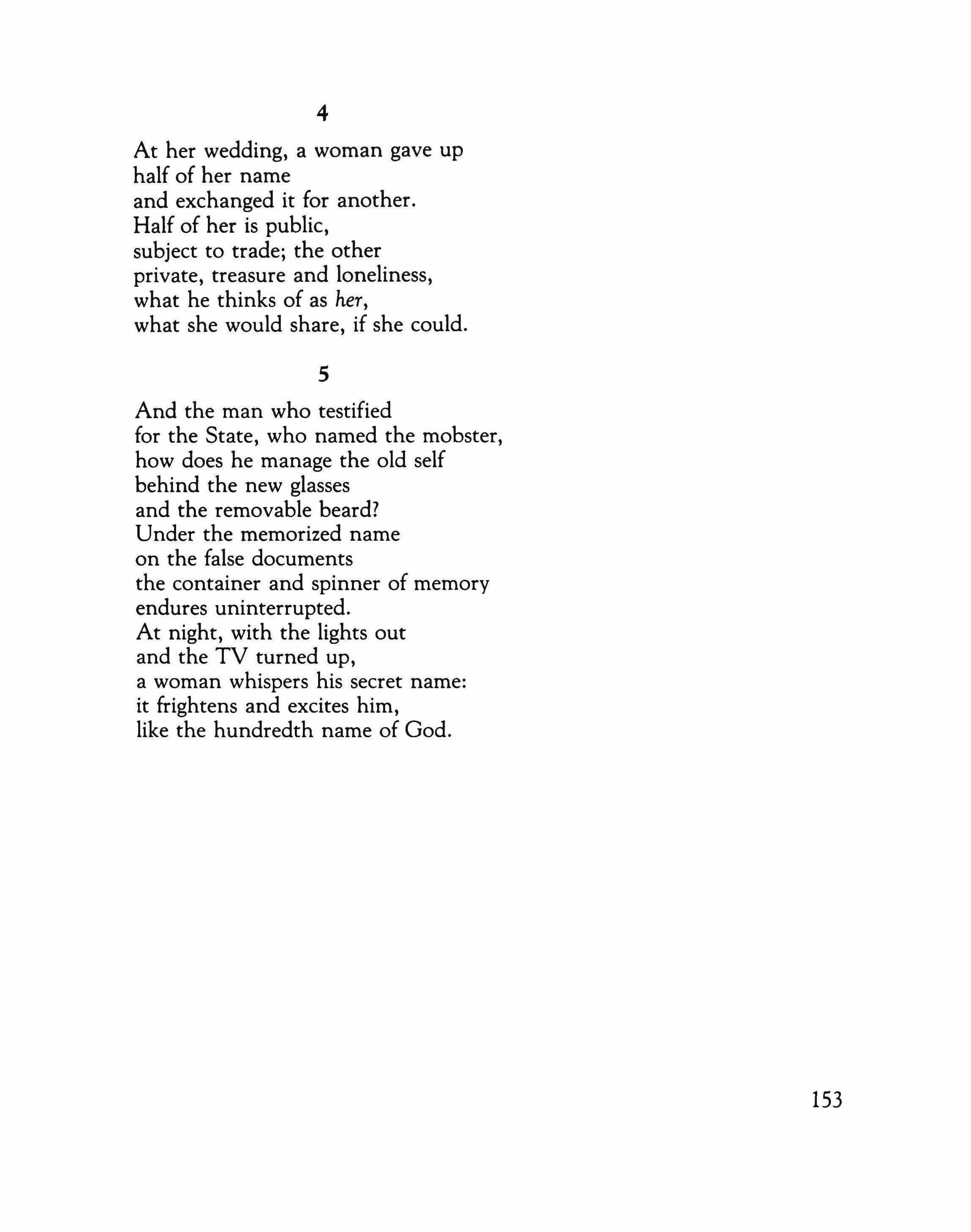
4
At her wedding, a woman gave up half of her name and exchanged it for another. Half of her is public, subject to trade; the other private, treasure and loneliness, what he thinks of as her, what she would share, if she could.
5
And the man who testified for the State, who named the mobster, how does he manage the old self behind the new glasses and the removable beard? Under the memorized name on the false documents the container and spinner of memory endures uninterrupted. At night, with the lights out and the TV turned up, a woman whispers his secret name: it frightens and excites him, like the hundredth name of God.
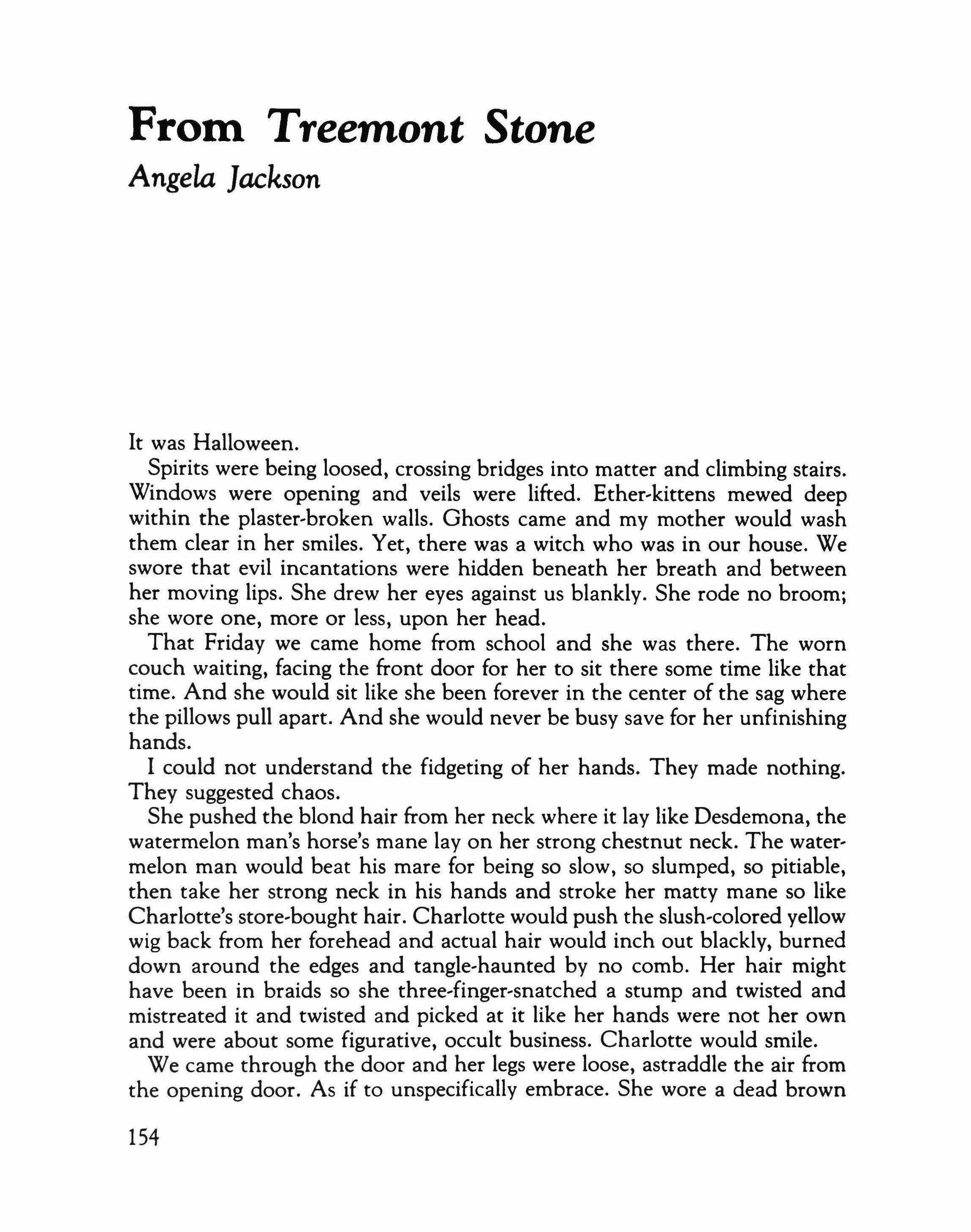
It was Halloween.
Spirits were being loosed, crossing bridges into matter and climbing stairs. Windows were opening and veils were lifted. Ether-kittens mewed deep within the plaster-broken walls. Ghosts came and my mother would wash them clear in her smiles. Yet, there was a witch who was in our house. We swore that evil incantations were hidden beneath her breath and between her moving lips. She drew her eyes against us blankly. She rode no broom; she wore one, more or less, upon her head.
That Friday we came home from school and she was there. The worn couch waiting, facing the front door for her to sit there some time like that time. And she would sit like she been forever in the center of the sag where the pillows pull apart. And she would never be busy save for her unfinishing hands.
I could not understand the fidgeting of her hands. They made nothing. They suggested chaos.
She pushed the blond hair from her neck where it lay like Desdemona, the watermelon man's horse's mane lay on her strong chestnut neck. The water' melon man would beat his mare for being so slow, so slumped, so pitiable, then take her strong neck in his hands and stroke her matty mane so like Charlotte's store-bought hair. Charlotte would push the slush-colored yellow wig back from her forehead and actual hair would inch out blackly, burned down around the edges and tangle-haunted by no comb. Her hair might have been in braids so she three-finger-snatched a stump and twisted and mistreated it and twisted and picked at it like her hands were not her own and were about some figurative, occult business. Charlotte would smile.
We came through the door and her legs were loose, astraddle the air from the opening door. As if to unspecifically embrace. She wore a dead brown
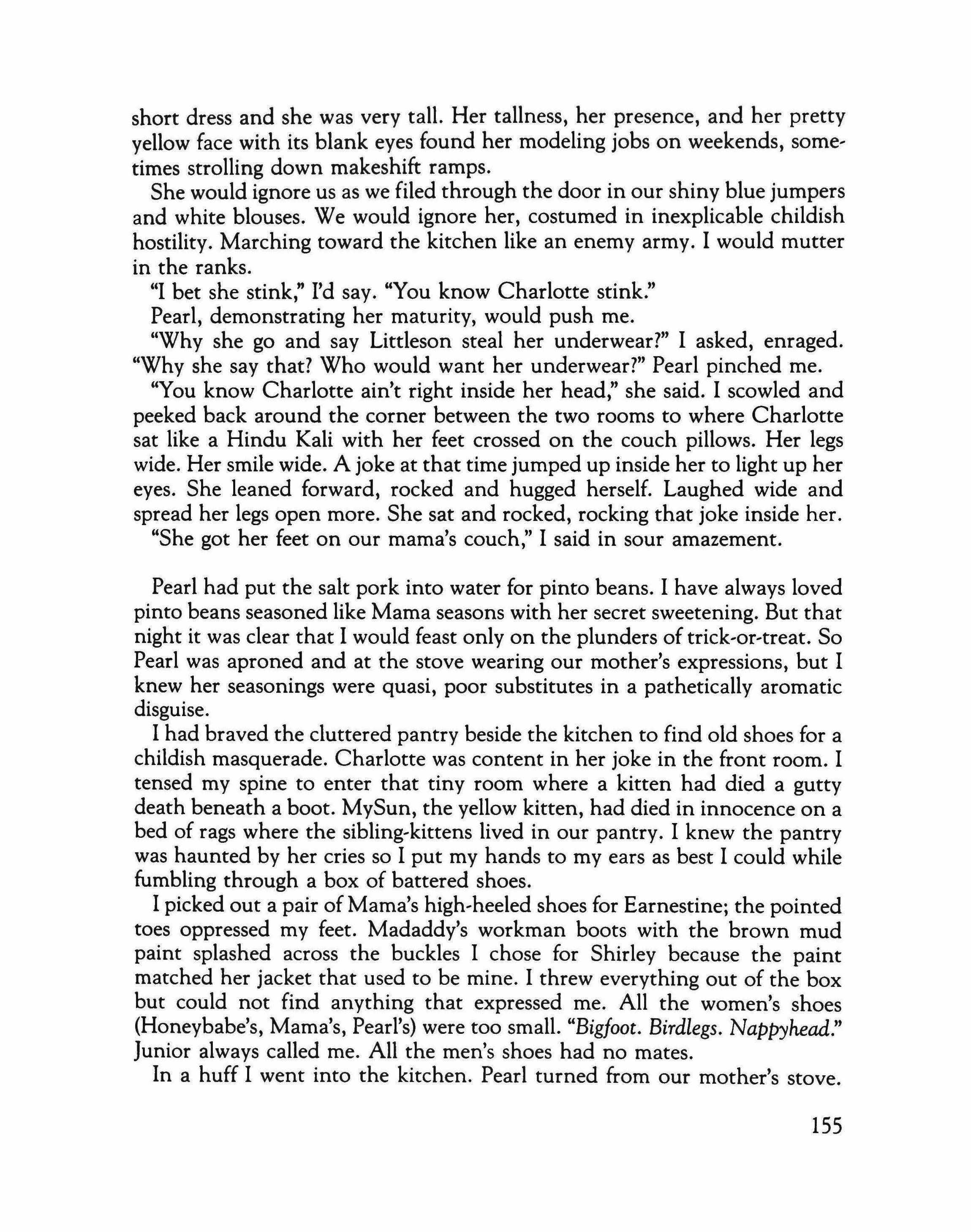
short dress and she was very tall. Her tallness, her presence, and her pretty yellow face with its blank eyes found her modeling jobs on weekends, some' times strolling down makeshift ramps.
She would ignore us as we filed through the door in our shiny blue jumpers and white blouses. We would ignore her, costumed in inexplicable childish hostility. Marching toward the kitchen like an enemy army. I would mutter in the ranks.
"I bet she stink," I'd say. "You know Charlotte stink."
Pearl, demonstrating her maturity, would push me.
"Why she go and say Littleson steal her underwear?" I asked, enraged. "Why she say that? Who would want her underwear?" Pearl pinched me.
"You know Charlotte ain't right inside her head," she said. I scowled and peeked back around the corner between the two rooms to where Charlotte sat like a Hindu Kali with her feet crossed on the couch pillows. Her legs wide. Her smile wide. A joke at that time jumped up inside her to light up her eyes. She leaned forward, rocked and hugged herself. Laughed wide and spread her legs open more. She sat and rocked, rocking that joke inside her.
"She got her feet on our mama's couch," I said in sour amazement.
Pearl had put the salt pork into water for pinto beans. I have always loved pinto beans seasoned like Mama seasons with her secret sweetening. But that night it was clear that I would feast only on the plunders of trick-or-treat. So Pearl was aproned and at the stove wearing our mother's expressions, but I knew her seasonings were quasi, poor substitutes in a pathetically aromatic disguise.
I had braved the cluttered pantry beside the kitchen to find old shoes for a childish masquerade. Charlotte was content in her joke in the front room. I tensed my spine to enter that tiny room where a kitten had died a gutty death beneath a boot. MySun, the yellow kitten, had died in innocence on a bed of rags where the sibling,kittens lived in our pantry. I knew the pantry was haunted by her cries so I put my hands to my ears as best I could while fumbling through a box of battered shoes.
I picked out a pair of Mama's high-heeled shoes for Earnestine; the pointed toes oppressed my feet. Madaddy's workman boots with the brown mud paint splashed across the buckles I chose for Shirley because the paint matched her jacket that used to be mine. I threw everything out of the box but could not find anything that expressed me. All the women's shoes (Honeybabe's, Mama's, Pearl's) were too small. "Bigfoot. Birdlegs. Nappyhead." Junior always called me. All the men's shoes had no mates.
In a huff I went into the kitchen. Pearl turned from our mother's stove.
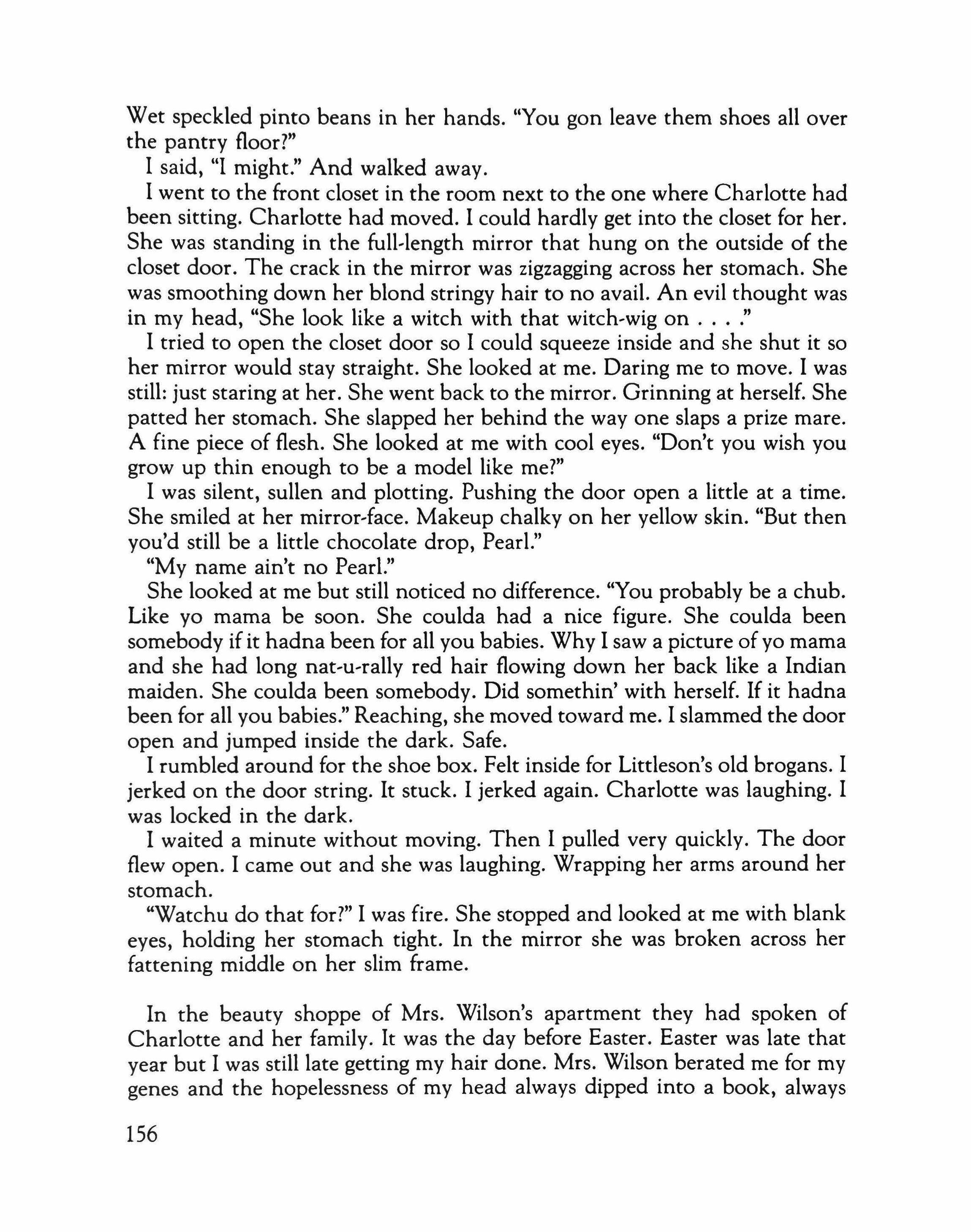
Wet speckled pinto beans in her hands. "You gon leave them shoes all over the pantry floor?"
I said, "I might." And walked away.
I went to the front closet in the room next to the one where Charlotte had been sitting. Charlotte had moved. I could hardly get into the closet for her. She was standing in the full,length mirror that hung on the outside of the closet door. The crack in the mirror was zigzagging across her stomach. She was smoothing down her blond stringy hair to no avail. An evil thought was in my head, "She look like a witch with that witch-wig on "
I tried to open the closet door so I could squeeze inside and she shut it so her mirror would stay straight. She looked at me. Daring me to move. I was still: just staring at her. She went back to the mirror. Grinning at herself. She patted her stomach. She slapped her behind the way one slaps a prize mare. A fine piece of flesh. She looked at me with cool eyes. "Don't you wish you grow up thin enough to be a model like me?"
I was silent, sullen and plotting. Pushing the door open a little at a time. She smiled at her mirror-face. Makeup chalky on her yellow skin. "But then you'd still be a little chocolate drop, Pearl."
"My name ain't no Pearl."
She looked at me but still noticed no difference. "You probably be a chub. Like yo mama be soon. She coulda had a nice figure. She coulda been somebody if it hadna been for all you babies. Why I saw a picture of yo mama and she had long nat-u-rally red hair flowing down her back like a Indian maiden. She coulda been somebody. Did sornethin' with herself. If it hadna been for all you babies." Reaching, she moved toward me. I slammed the door open and jumped inside the dark. Safe.
I rumbled around for the shoe box. Felt inside for Littleson's old brogans. I jerked on the door string. It stuck. I jerked again. Charlotte was laughing. I was locked in the dark.
I waited a minute without moving. Then I pulled very quickly. The door flew open. I came out and she was laughing. Wrapping her arms around her stomach.
"Watchu do that for?" I was fire. She stopped and looked at me with blank eyes, holding her stomach tight. In the mirror she was broken across her fattening middle on her slim frame.
In the beauty shoppe of Mrs. Wilson's apartment they had spoken of Charlotte and her family. It was the day before Easter. Easter was late that year but I was still late getting my hair done. Mrs. Wilson berated me for my genes and the hopelessness of my head always dipped into a book, always
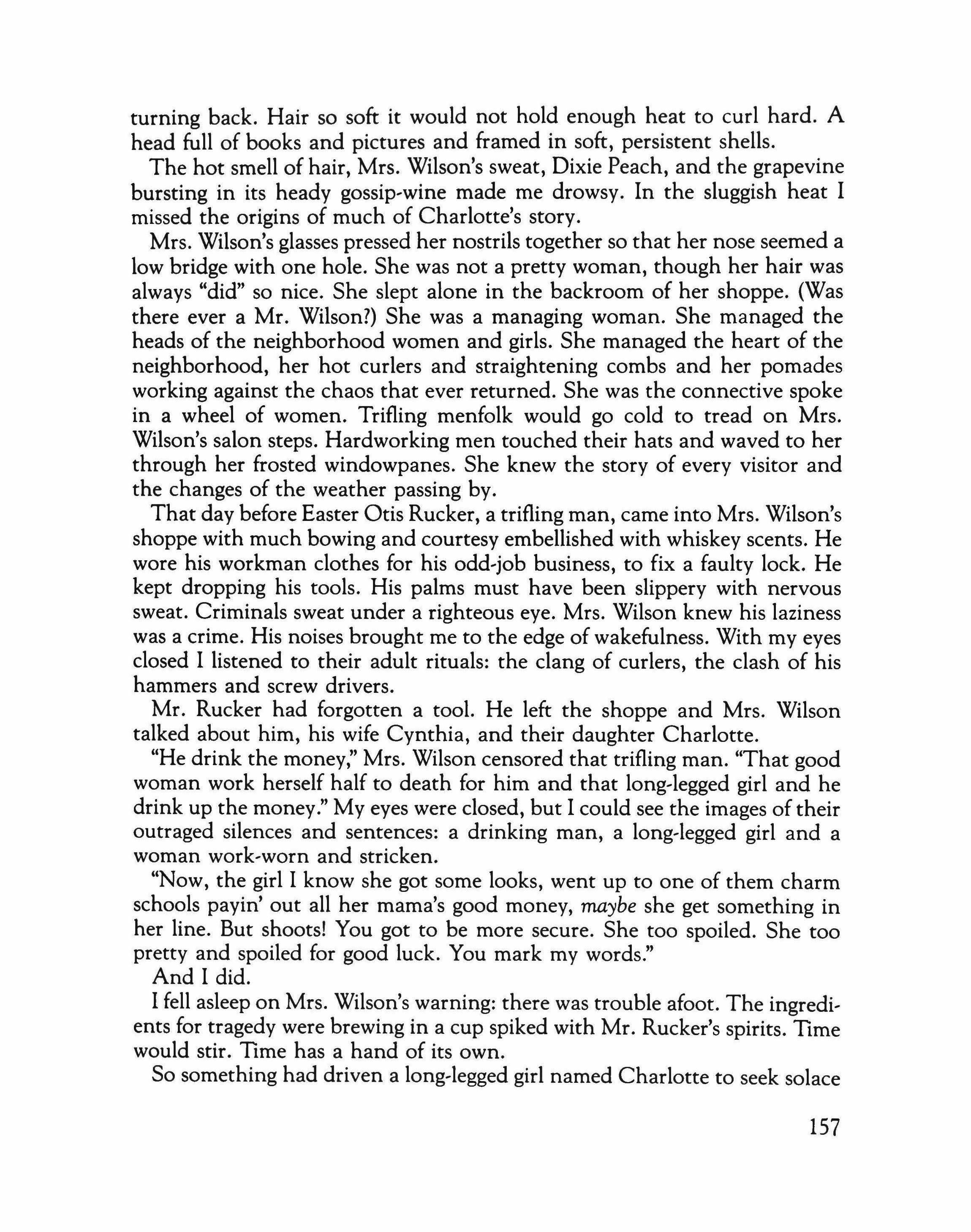
turning back. Hair so soft it would not hold enough heat to curl hard. A head full of books and pictures and framed in soft, persistent shells.
The hot smell of hair, Mrs. Wilson's sweat, Dixie Peach, and the grapevine bursting in its heady gossip-wine made me drowsy. In the sluggish heat I missed the origins of much of Charlotte's story.
Mrs. Wilson's glasses pressed her nostrils together so that her nose seemed a low bridge with one hole. She was not a pretty woman, though her hair was always "did" so nice. She slept alone in the backroom of her shoppe. (Was there ever a Mr. Wilson?) She was a managing woman. She managed the heads of the neighborhood women and girls. She managed the heart of the neighborhood, her hot curlers and straightening combs and her pomades working against the chaos that ever returned. She was the connective spoke in a wheel of women. Trifling menfolk would go cold to tread on Mrs. Wilson's salon steps. Hardworking men touched their hats and waved to her through her frosted windowpanes. She knew the story of every visitor and the changes of the weather passing by.
That day before Easter Otis Rucker, a trifling man, came into Mrs. Wilson's shoppe with much bowing and courtesy embellished with whiskey scents. He wore his workman clothes for his odd-job business, to fix a faulty lock. He kept dropping his tools. His palms must have been slippery with nervous sweat. Criminals sweat under a righteous eye. Mrs. Wilson knew his laziness was a crime. His noises brought me to the edge of wakefulness. With my eyes closed I listened to their adult rituals: the clang of curlers, the clash of his hammers and screw drivers.
Mr. Rucker had forgotten a tool. He left the shoppe and Mrs. Wilson talked about him, his wife Cynthia, and their daughter Charlotte.
"He drink the money," Mrs. Wilson censored that trifling man. "That good woman work herself half to death for him and that long'legged girl and he drink up the money." My eyes were closed, but I could see the images of their outraged silences and sentences: a drinking man, a long,legged girl and a woman work-worn and stricken.
"Now, the girl I know she got some looks, went up to one of them charm schools payin' out all her mama's good money, maybe she get something in her line. But shoots! You got to be more secure. She too spoiled. She too pretty and spoiled for good luck. You mark my words."
And I did.
I fell asleep on Mrs. Wilson's warning: there was trouble afoot. The ingredients for tragedy were brewing in a cup spiked with Mr. Rucker's spirits. Time would stir. Time has a hand of its own.
So something had driven a long-legged girl named Charlotte to seek solace

in the home of her friend who was my oldest sister, Honore Grace, called Honeybabe: Cynthia, Charlotte's mother, had died.
Charlotte's mother worked herself to death, all the women said. I heard about it in the shoppe when I brought the chicken dinner Mrs. Wilson had sent me and Jade for. Mrs. Wilson had told Miss Rose that Mrs. Rucker had passed. Jade told me she didn't know Mrs. Rucker had gone to school. Mrs. Wilson slapped us both with a big black comb and sent us out the door.
One week before Halloween when Charlotte had been in our house for two weeks, when her presence had sat like a crimson aura upon Littleson and me and the impassive Pearl, one week we labeled some of the ingredients of Charlotte's story. The label was made of religious words like man, woman, want, need, and sex.
Mr. Rucker had come to our house accompanied by a friend. Miss Rose and our mama were sitting in the front room. Mama in Madaddy's big chair. Miss Rose on the couch where Charlotte usually sat. Charlotte, weeping under her ineffectual blond wig, had secreted herself in the bathroom.
Mr. Rucker told Mama she "better get the girl's clothes together now cause she comin' with me."
My mother answered him in her most refined voice, generally reserved for the insurance man and other white people. She said that her husband would be home later and perhaps they would care to wait and speak with him. They wrangled for a time. Mr. Rucker yelling that Charlotte was his blood and Miss Rose yelling back that the blood needed letting now or never. Mama and Miss Rose looked at the two men as if they were watching a stockyard truck go by.
In the face of their feminine disdain so like the dead Cynthia's, Mr. Rucker thrust his companion forward, forming an articulate barrier between himself and such entrenched opposition.
Mr. Rucker's friend was wearing an old gray suit, the pants with a shiny seat. He was carrying a greasy gray hat and he handed Mama a card she read aloud and passed to Miss Rose: Reverent Doctor Tobias lessuah Hill: Spiritual and Metaphysical Advisor; Psychological Physician. "Madams," he announced, "allow me to introduce myself; my name is Tobias Hill. Reverent Doctor Tobias Hill. As you will see written on my calling card, I am a psychological physician and a philosophical colleague of Mr. Rucker. Miss Charlotte Rucker is under my medicinal supervision." My mama's face was a study of stockyard odors.
Then Littleson pulled me from the door saying, "I cain't hear."
I said, "I was here first." Littleson and I skirmished.
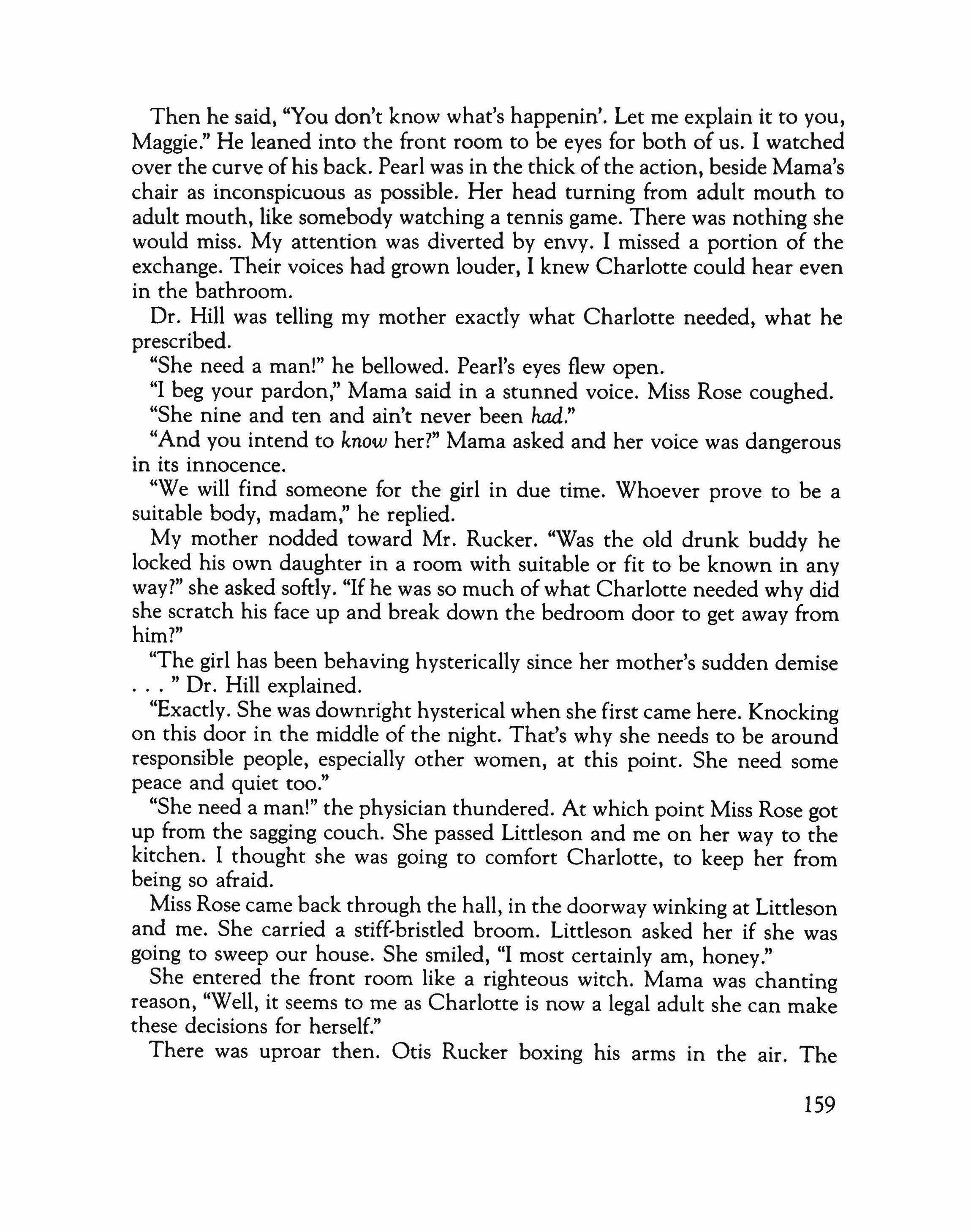
Then he said, "You don't know what's happenin'. Let me explain it to you, Maggie." He leaned into the front room to be eyes for both of us. I watched over the curve of his back. Pearl was in the thick of the action, beside Mama's chair as inconspicuous as possible. Her head turning from adult mouth to adult mouth, like somebody watching a tennis game. There was nothing she would miss. My attention was diverted by envy. I missed a portion of the exchange. Their voices had grown louder, I knew Charlotte could hear even in the bathroom.
Dr. Hill was telling my mother exactly what Charlotte needed, what he prescribed.
"She need a man!" he bellowed. Pearl's eyes flew open.
"1 beg your pardon," Mama said in a stunned voice. Miss Rose coughed.
"She nine and ten and ain't never been had."
"And you intend to know her?" Mama asked and her voice was dangerous in its innocence.
"We will find someone for the girl in due time. Whoever prove to be a suitable body, madam:' he replied.
My mother nodded toward Mr. Rucker. "Was the old drunk buddy he locked his own daughter in a room with suitable or fit to be known in any way?" she asked softly. "If he was so much of what Charlotte needed why did she scratch his face up and break down the bedroom door to get away from him?"
"The girl has been behaving hysterically since her mother's sudden demise " Dr. Hill explained.
"Exactly. She was downright hysterical when she first came here. Knocking on this door in the middle of the night. That's why she needs to be around responsible people, especially other women, at this point. She need some peace and quiet too."
"She need a man!" the physician thundered. At which point Miss Rose got up from the sagging couch. She passed Littleson and me on her way to the kitchen. I thought she was going to comfort Charlotte, to keep her from being so afraid.
Miss Rose came back through the hall, in the doorway winking at Littleson and me. She carried a stiff-bristled broom. Littleson asked her if she was going to sweep our house. She smiled, "1 most certainly am, honey."
She entered the front room like a righteous witch. Mama was chanting reason, "Well, it seems to me as Charlotte is now a legal adult she can make these decisions for herself."
There was uproar then. Otis Rucker boxing his arms in the air. The

psychological physician raging in words of more than three syllables. He made no sense but noise. Neither man made an actual physical threat lest word go back to our father, Sam Grace.
The words and sights were horrendous. In the center of it all Miss Rose was wielding her broom. She swept them out the front door and down the steps into the street. From the window we watched the shiny seat of Dr. Hill's pants disappear into the evening.
Charlotte stayed in the bathroom all evening. I loved the excitement, but that-the rituals' she generated, the forbidden words surrounding her-could be held for longer than I could hold my water. I hated her. I had to go downstairs to our neighbor's to use the toilet.
Littleson was my ace boon coon. But, well, I think now I was never so dear to him. Or do I deprive him of his loving credentials? Eddie was, at that time, his best running buddy. They were as thick as thieves. Acrobatic in their intrigues. I was never so able. Where once Littleson and I had been inseparables, he had grown increasingly aloof. I was losing my brother to the sealed camaraderie of males. So I found myself embarking into All Hallows' Eve evening with Ernee and Shir, the two sisters just younger than me.
Each of us was dressed in collages of feminine and masculine paraphernalia. They were waving excited sounds above their heads, while swinging their, then, empty bags. I was in a muted mood, feeling as mix-marched as my costume.
Everything outside was in its season; the trees were speaking their autumn for trick-or-trear. The leaves were withering brittle. Blazing orange and brown and falling to the ground just so we could tramp through them in somebody else's boots. "Walk in someone else's moccasins and what happen to you?" Subdued and semi-hostile, I could not fit into the season.
I longed for a summer all crazy with leftover sweat and our child-faces wet with the Watermelon Rind Wars where we scrubbed our enemies' faces in the used whites of summer fruit. We would be tired from running and playing "werewolf," where Littleson was always the monster because he had two long dogteeth in his mouth. He could jump from the side-porch railing or the first landing of the house next door right onto his victim's back. Just like a real werewolf.
In flashes I would fear, moon or no moon, that perhaps Littleson had been transformed into the werewolf like Larry Tolbert or Lon Chaney Jr. He would kick and claw and scratch and bite just like a real werewolf. I liked it best when he did all those things to Jeannie. I was safe, I soothed myself with
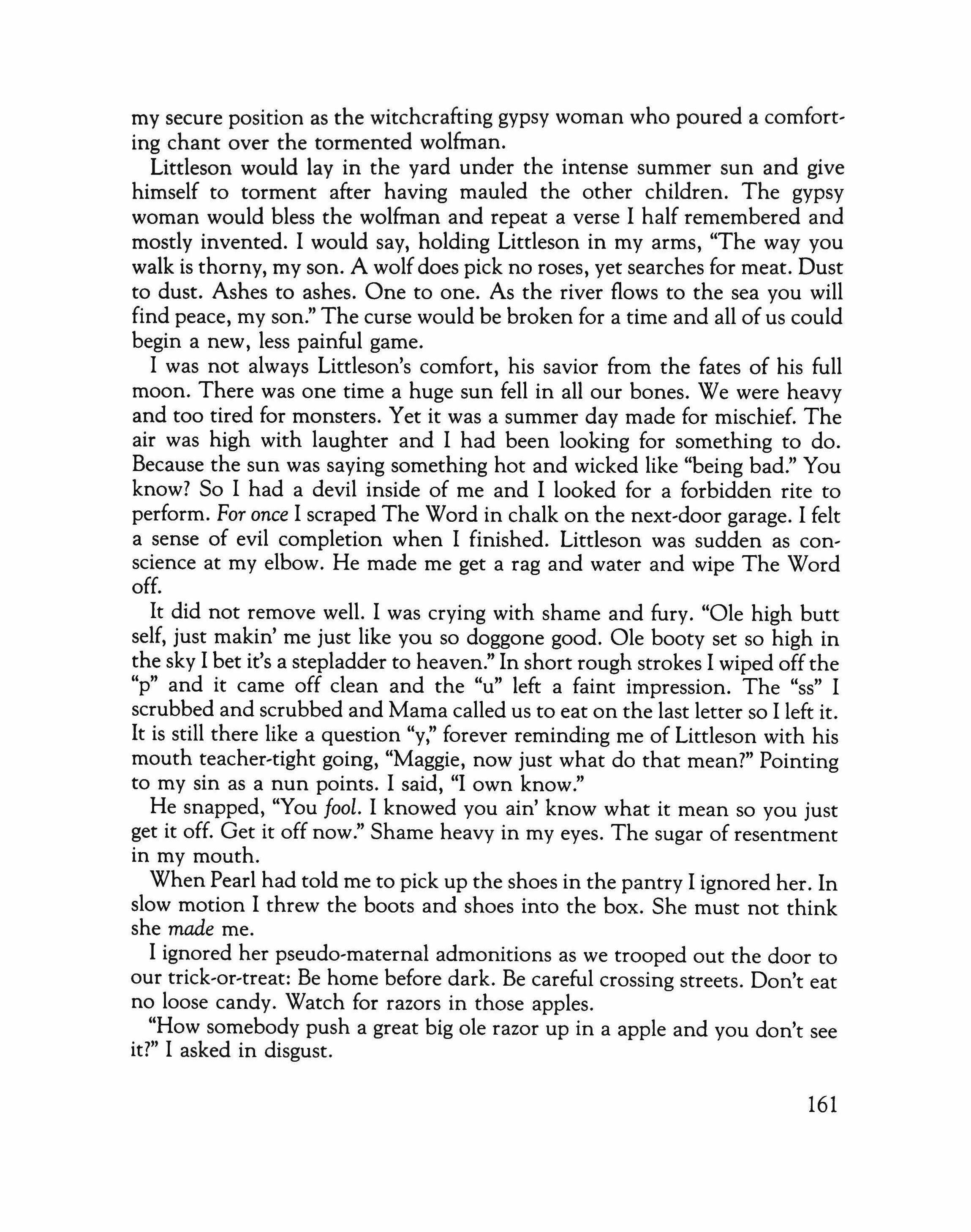
my secure position as the witchcrafting gypsy woman who poured a comfort' ing chant over the tormented wolfman.
Littleson would lay in the yard under the intense summer sun and give himself to torment after having mauled the other children. The gypsy woman would bless the wolfman and repeat a verse I half remembered and mostly invented. I would say, holding Littleson in my arms, "The way you walk is thorny, my son. A wolfdoes pick no roses, yet searches for meat. Dust to dust. Ashes to ashes. One to one. As the river flows to the sea you will find peace, my son." The curse would be broken for a time and all of us could begin a new, less painful game.
I was not always Littleson's comfort, his savior from the fates of his full moon. There was one time a huge sun fell in all our bones. We were heavy and too tired for monsters. Yet it was a summer day made for mischief. The air was high with laughter and I had been looking for something to do. Because the sun was saying something hot and wicked like "being bad." You know? So I had a devil inside of me and I looked for a forbidden rite to perform. For once I scraped The Word in chalk on the next'door garage. I felt a sense of evil completion when I finished. Littleson was sudden as con, science at my elbow. He made me get a rag and water and wipe The Word off.
It did not remove well. I was crying with shame and fury. "Ole high butt self, just makin' me just like you so doggone good. Ole booty set so high in the sky I bet it's a stepladder to heaven." In short rough strokes I wiped offthe "p" and it came off clean and the "u" left a faint impression. The "ss" I scrubbed and scrubbed and Mama called us to eat on the last letter so I left it. It is still there like a question "y," forever reminding me of Littleson with his mouth teacher-tight going, "Maggie, now just what do that mean?" Pointing to my sin as a nun points. I said, "I own know."
He snapped, "You fool. I knowed you ain' know what it mean so you just get it off. Get it off now." Shame heavy in my eyes. The sugar of resentment in my mouth.
When Pearl had told me to pick up the shoes in the pantry I ignored her. In slow motion I threw the boots and shoes into the box. She must not think she made me.
I ignored her pseudo-maternal admonitions as we trooped out the door to our trick-or-treat: Be home before dark. Be careful crossing streets. Don't eat no loose candy. Watch for razors in those apples.
"How somebody push a great big ole razor up in a apple and you don't see it?" I asked in disgust.

Ernee and Shir had gotten out of school late because Sister Veronica and Sister Irene wanted to impress on their good young clay minds how Hallow, een was a pagan rite that they must not practice. They must not maraud but must blowout their candle early and rise for mass on the Holy Day of Obligation, All Saints' Day. They had told me what the nuns had said while I helped them into their costumes. They twisted their faces as sour as Sister Irene's. I put white shoe polish on their faces. They looked like alabaster saints. They were still half-baby.
Pearl was leaning over the railing screaming warnings after us, trying to put Mama's music into her voice. So Mama would be proud of her when she came home from work.
"I ain't no dummy," I muttered.
Littleson had said he was too old for trick-or-treat. The year before the women who had opened their doors had looked at him with censorious eyes. They dropped broken candy into his bag. They gave whole candy bars to the smallest children who could not eat them, Butterfingers and Baby Ruths. Littleson refused to beg again.
We met him and Eddie and Leave-rna-be at the corner of our block. I asked Leave-rna-be if Jade was doing better. He grunted. I asked him what was wrong with her. He answered, "You oughtta know." They walked with us for a while.
Ernee and Shir stumbled in their ill-fitting shoes in front of us. I was in the middle. The three male guards brought up the rear. We would confront our victims in this manner. Ernee and Shir would advance to the closed door and beguile and beget sugar. My reward came capriciously. The boys stood at a disdainful distance.
We turned from each shutting door, our faces shelving sugar for another occasion. At a brick two-flat a smiling woman passed out apples. Walking down the street I inspected mine. Littleson had something to say.
"Don't eat none a them apples. They might got razor blades in 'em."
"Ain no razor blades in these apples, honey."
"Well, they dirty so don't eat them."
I told him at that from here on I'd be glad to take care of myself. He, Eddie, and Leave-rna-be left us saying they'd meet us at the corner in an hour. I watched them run wildly up the skinny street under the low lights.
Mr. Rucker under the streetlights. He was riding the fire hydrant and whiskey riding him. His dirty gray work-clothes crumpled on him. When we went past him he said, "Where my daughter? Ain chu some of them got her?"
We rolled our eyes at him and shot around the corner. We could smell
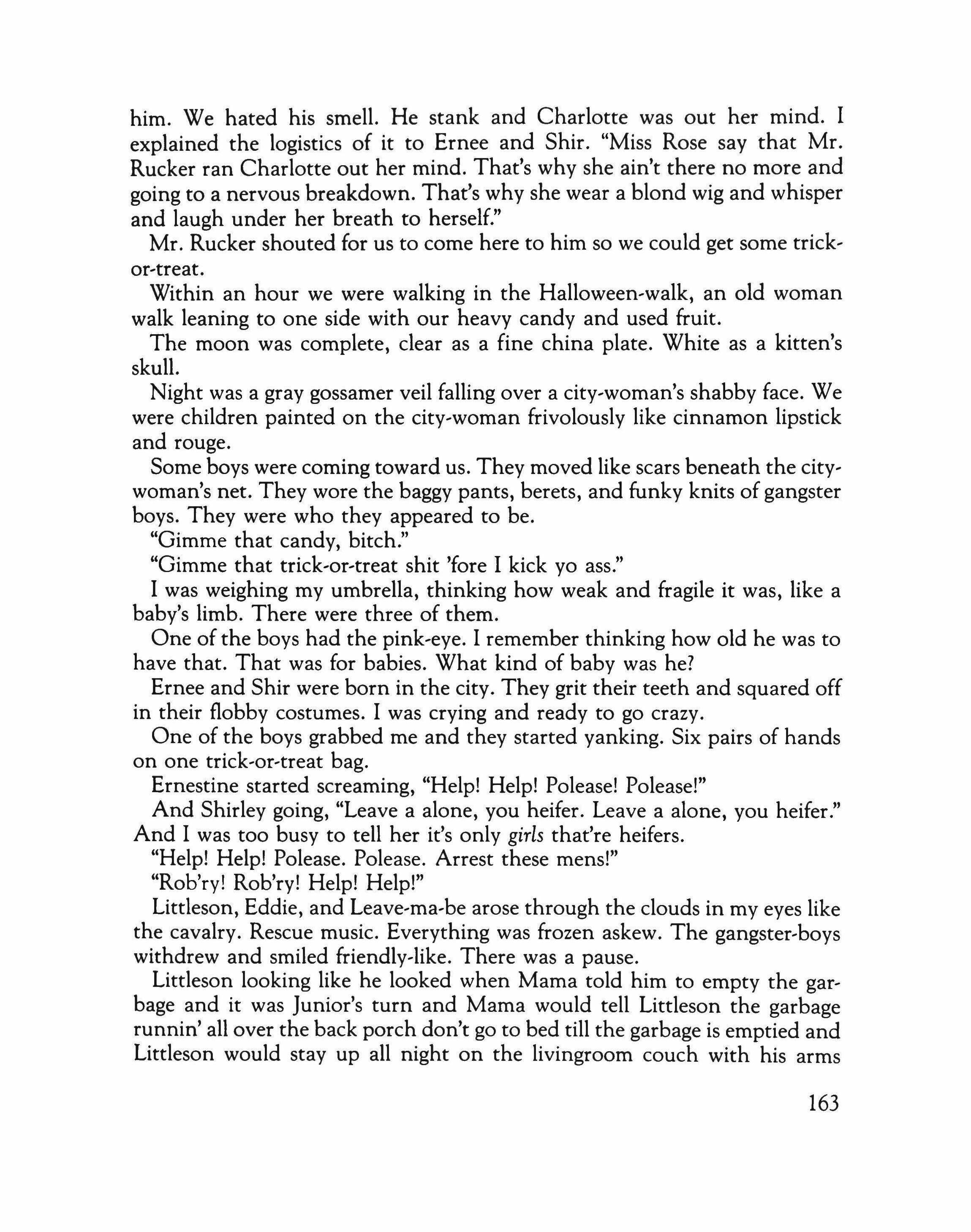
him. We hated his smell. He stank and Charlotte was out her mind. I explained the logistics of it to Ernee and Shir. "Miss Rose say that Mr. Rucker ran Charlotte out her mind. That's why she ain't there no more and going to a nervous breakdown. That's why she wear a blond wig and whisper and laugh under her breath to herself."
Mr. Rucker shouted for us to come here to him so we could get some trick, or-treat.
Within an hour we were walking in the Halloween-walk, an old woman walk leaning to one side with our heavy candy and used fruit.
The moon was complete, clear as a fine china plate. White as a kitten's skull.
Night was a gray gossamer veil falling over a city-woman's shabby face. We were children painted on the city-woman frivolously like cinnamon lipstick and rouge.
Some boys were coming toward us. They moved like scars beneath the city, woman's net. They wore the baggy pants, berets, and funky knits of gangster boys. They were who they appeared to be.
"Gimme that candy, bitch."
"Gimme that trick-or-treat shit 'fore I kick yo ass."
I was weighing my umbrella, thinking how weak and fragile it was, like a baby's limb. There were three of them.
One of the boys had the pink-eye. I remember thinking how old he was to have that. That was for babies. What kind of baby was he?
Ernee and Shir were born in the city. They grit their teeth and squared off in their flobby costumes. I was crying and ready to go crazy.
One of the boys grabbed me and they started yanking. Six pairs of hands on one trick-or-treat bag.
Ernestine started screaming, "Help! Help! Polease! Polease!"
And Shirley going, "Leave a alone, you heifer. Leave a alone, you heifer." And I was too busy to tell her it's only girls that're heifers.
"Help! Help! Polease. Polease. Arrest these mens!"
"Rob'ry! Rob'ry! Help! Help!"
Littleson, Eddie, and Leave-rna-be arose through the clouds in my eyes like the cavalry. Rescue music. Everything was frozen askew. The gangster-boys withdrew and smiled friendly-like. There was a pause.
Littleson looking like he looked when Mama told him to empty the gar' bage and it was Junior's turn and Mama would tell Littleson the garbage runnin' all over the back porch don't go to bed till the garbage is emptied and Littleson would stay up all night on the livingroom couch with his arms
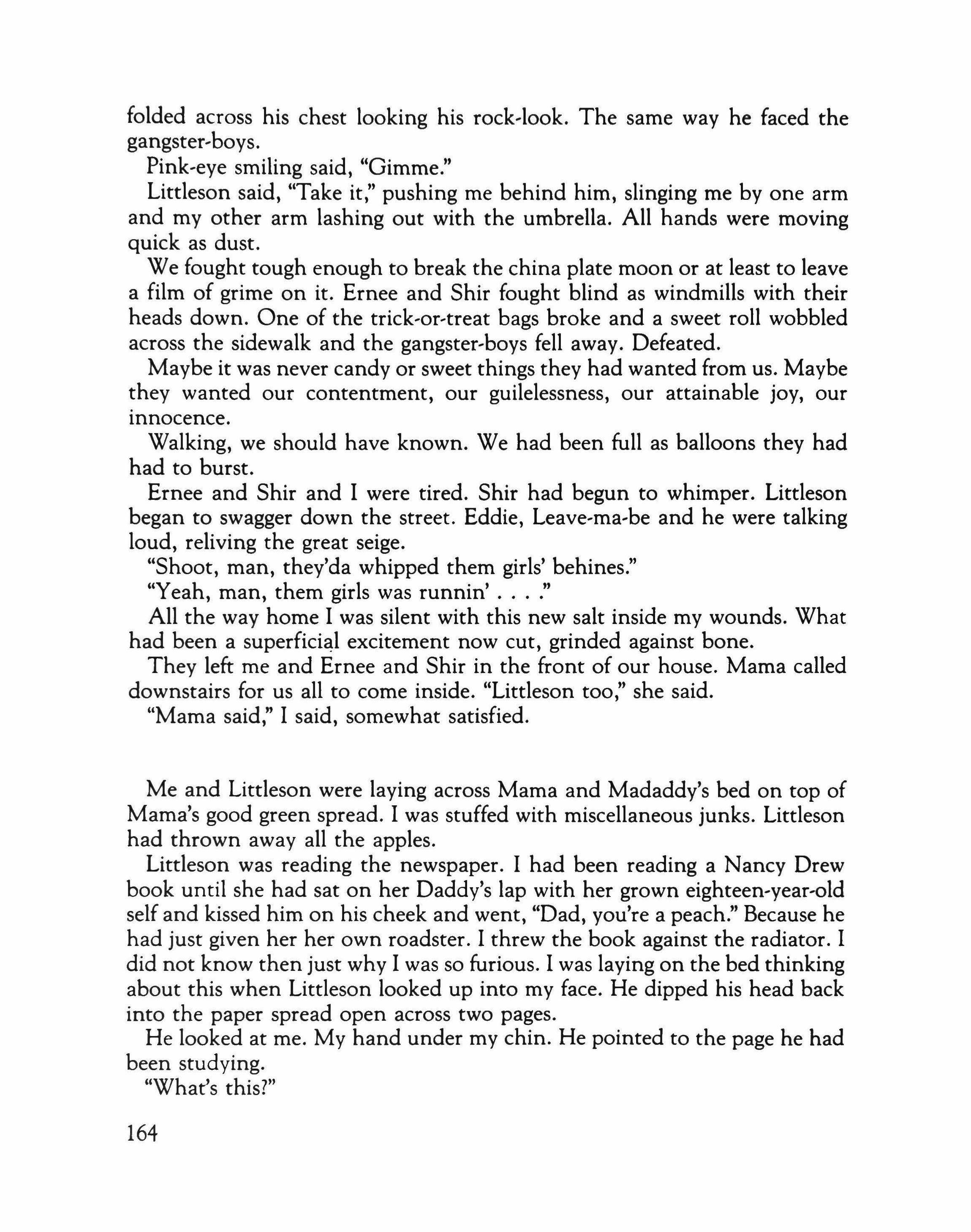
folded across his chest looking his rock-look. The same way he faced the gangster-boys.
Pink-eye smiling said, "Gimrne,"
Littleson said, "Take it," pushing me behind him, slinging me by one arm and my other arm lashing out with the umbrella. All hands were moving quick as dust.
We fought tough enough to break the china plate moon or at least to leave a film of grime on it. Ernee and Shir fought blind as windmills with their heads down. One of the trick-or-treat bags broke and a sweet roll wobbled across the sidewalk and the gangster-boys fell away. Defeated.
Maybe it was never candy or sweet things they had wanted from us. Maybe they wanted our contentment, our guilelessness, our attainable joy, our innocence.
Walking, we should have known. We had been full as balloons they had had to burst.
Ernee and Shir and I were tired. Shir had begun to whimper. Littleson began to swagger down the street. Eddie, Leave-rna-be and he were talking loud, reliving the great seige.
"Shoot, man, they'da whipped them girls' behines."
"Yeah, man, them girls was runnin'
All the way home I was silent with this new salt inside my wounds. What had been a superficial excitement now cut, grinded against bone.
They left me and Ernee and Shir in the front of our house. Mama called downstairs for us all to come inside. "Littleson too," she said.
"Mama said," I said, somewhat satisfied.
Me and Littleson were laying across Mama and Madaddy's bed on top of Mama's good green spread. I was stuffed with miscellaneous junks. Littleson had thrown away all the apples.
Littleson was reading the newspaper. I had been reading a Nancy Drew book until she had sat on her Daddy's lap with her grown eighteen-year-old self and kissed him on his cheek and went, "Dad, you're a peach." Because he had just given her her own roadster. I threw the book against the radiator. I did not know then just why I was so furious. I was laying on the bed thinking about this when Littleson looked up into my face. He dipped his head back into the paper spread open across two pages.
He looked at me. My hand under my chin. He pointed to the page he had been studying.
"What's this?"
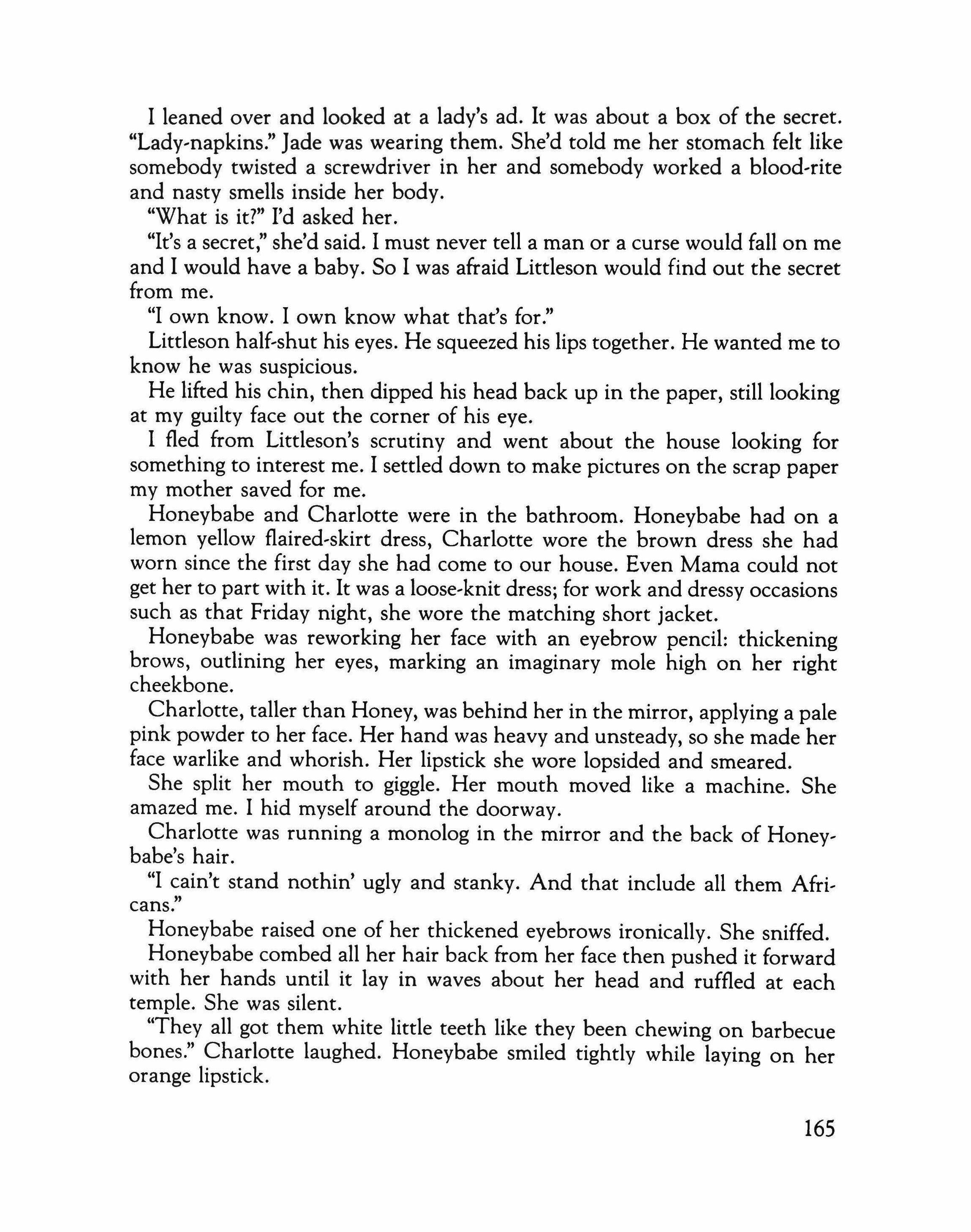
I leaned over and looked at a lady's ad. It was about a box of the secret. "Lady-napkins," Jade was wearing them. She'd told me her stomach felt like somebody twisted a screwdriver in her and somebody worked a blood-rite and nasty smells inside her body.
"What is it?" I'd asked her.
"It's a secret," she'd said. I must never tell a man or a curse would fall on me and I would have a baby. So I was afraid Littleson would find out the secret from me.
"I own know. I own know what that's for."
Littleson half-shut his eyes. He squeezed his lips together. He wanted me to know he was suspicious.
He lifted his chin, then dipped his head back up in the paper, still looking at my guilty face out the corner of his eye.
I fled from Littleson's scrutiny and went about the house looking for something to interest me. I settled down to make pictures on the scrap paper my mother saved for me.
Honeybabe and Charlotte were in the bathroom. Honeybabe had on a lemon yellow flaired-skirt dress, Charlotte wore the brown dress she had worn since the first day she had come to our house. Even Mama could not get her to part with it. It was a loose'knit dress; for work and dressy occasions such as that Friday night, she wore the matching short jacket.
Honeybabe was reworking her face with an eyebrow pencil: thickening brows, outlining her eyes, marking an imaginary mole high on her right cheekbone.
Charlotte, taller than Honey, was behind her in the mirror, applying a pale pink powder to her face. Her hand was heavy and unsteady, so she made her face warlike and whorish. Her lipstick she wore lopsided and smeared.
She split her mouth to giggle. Her mouth moved like a machine. She amazed me. I hid myself around the doorway.
Charlotte was running a monolog in the mirror and the back of Honey, babe's hair.
"I cain't stand nothin' ugly and stanky. And that include all them Africans."
Honeybabe raised one of her thickened eyebrows ironically. She sniffed. Honeybabe combed all her hair back from her face then pushed it forward with her hands until it lay in waves about her head and ruffled at each temple. She was silent.
"They all got them white little teeth like they been chewing on barbecue bones." Charlotte laughed. Honeybabe smiled tightly while laying on her orange lipstick.
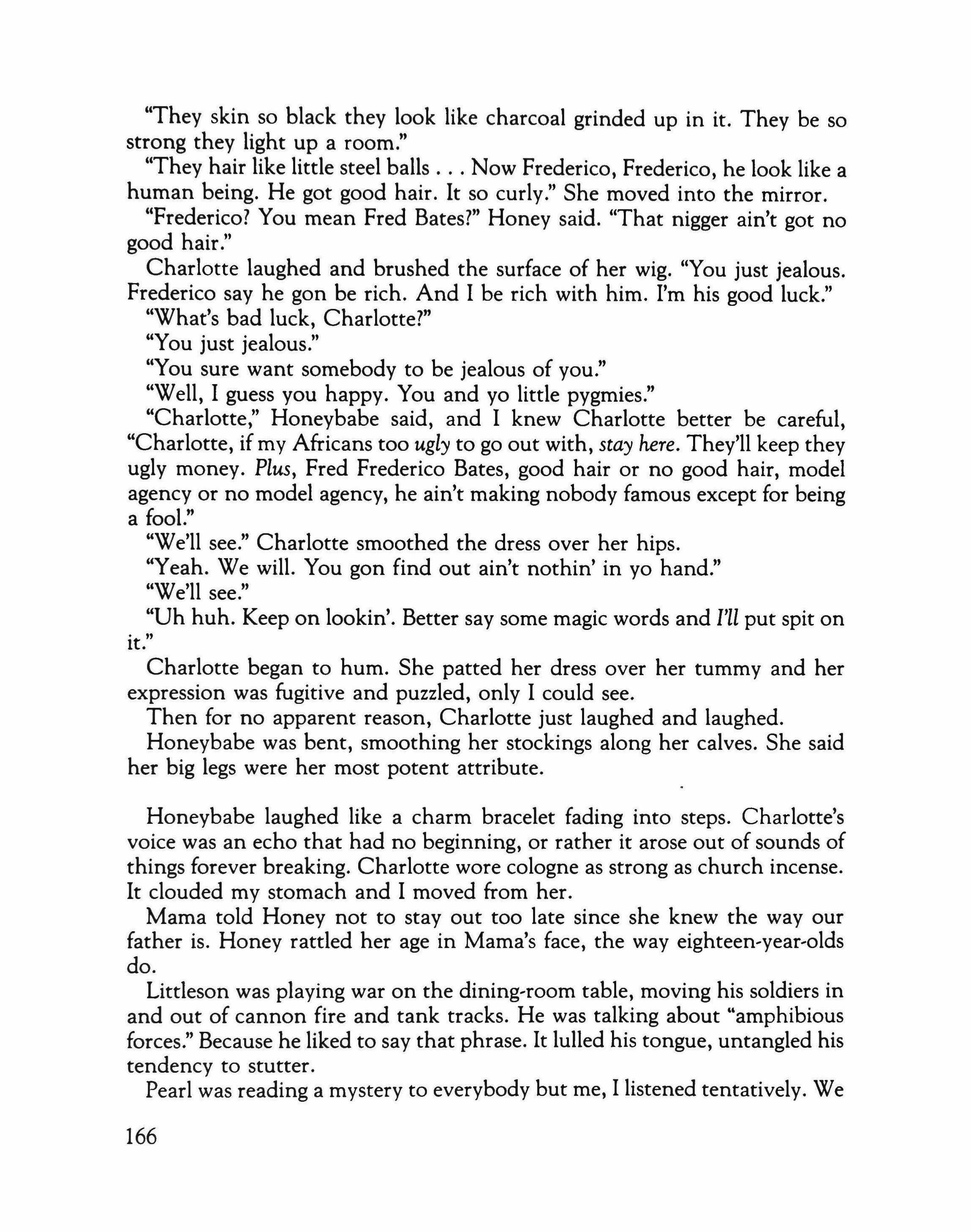
"They skin so black they look like charcoal grinded up in it. They be so strong they light up a room."
"They hair like little steel balls Now Frederico, Frederico, he look like a human being. He got good hair. It so curly." She moved into the mirror. "Frederico? You mean Fred Bates?" Honey said. "That nigger ain't got no good hair."
Charlotte laughed and brushed the surface of her wig. "You just jealous. Frederico say he gon be rich. And I be rich with him. I'm his good luck."
"What's bad luck, Charlotte?"
"You just jealous."
"You sure want somebody to be jealous of you."
"Well, I guess you happy. You and yo little pygmies."
"Charlotte," Honeybabe said, and I knew Charlotte better be careful, "Charlotte, if my Africans too ugly to go out with, stay here. They'll keep they ugly money. Plus, Fred Frederico Bates, good hair or no good hair, model agency or no model agency, he ain't making nobody famous except for being a fool,"
"We'll see." Charlotte smoothed the dress over her hips. "Yeah. We will. You gon find out ain't nothin' in yo hand."
"We'll see."
"Uh huh. Keep on lookin'. Better say some magic words and I'll put spit on it."
Charlotte began to hum. She patted her dress over her tummy and her expression was fugitive and puzzled, only I could see.
Then for no apparent reason, Charlotte just laughed and laughed. Honeybabe was bent, smoothing her stockings along her calves. She said her big legs were her most potent attribute.
Honeybabe laughed like a charm bracelet fading into steps. Charlotte's voice was an echo that had no beginning, or rather it arose out of sounds of things forever breaking. Charlotte wore cologne as strong as church incense. It clouded my stomach and I moved from her.
Mama told Honey not to stay out too late since she knew the way our father is. Honey rattled her age in Mama's face, the way eighteen-year-olds do.
Littleson was playing war on the dining-room table, moving his soldiers in and out of cannon fire and tank tracks. He was talking about "amphibious forces." Because he liked to say that phrase. It lulled his tongue, untangled his tendency to stutter.
Pearl was reading a mystery to everybody but me, I listened tentatively. We

were each in our way when the Africans came, we were each in our way when they left.
They wore business suits and spoke in British accents with lovely herbs ground into certain syllables. I closed my eyes and was enchanted with the melodies they made. Eyes open I could see Honey shoulder to shoulder with Wally. Charlotte was a painted tree casting a pale shadow over Charles Aduba's dark bush.
I watched them float away in engine smoke. On the front steps I sucked in the gas fumes. Honey saw that I had trailed them down the steps. She promised, at last, to bring me something back if I was a good girl.
My father is a man who thinks that things are generally what they seem. At least for other people: I was in bed with Littleson so we were sleeping half submerged in covers.
Mama would have known by the shape of my spine and my head under cover and by the texture of our breathing, Littleson's deep and slow, mine quick and ethereal, that I was wide,awake and reading Trixie Belden by flashlight. My father's mind believes that what exists lives. He knows no nuances but his own. So he closed his bedroom door satisfied that the one child of his not accounted for was Honeybabe, the other child missing was a foreigner and ununderstandable and preposterous in her pain.
I could hear his steps and stopping when he interrogated Mama about the absence of Honey. Mama's replies were sleep and half-annoyed. Then a silence took the house save for boards and springs that cried out thinly and always suddenly in sounds a kitten's ghost would make.
I gave up reading and went into restless sleep, the ghost of a kitten walking on my nerves.
My face was in the moon in the window. Sleeping at the foot of the bed. Littleson wiggled his feet in my chest. My chest was just a chest like his still. The day before I'd practiced wearing a bra in the mirror. Mama'd come in to say don't be in no hurry, it be there directly.
So my chest was bare. And my throat was dry. I was drinking spit over from my mouth.
I had to walk in the dark. Last week a werewolf I had seen on the dresser had been just dried clothes from the line, bundled and rough. I walked past the mirror and eyes were blinking at me. I didn't see the beast they were attached to. A familiar? It was there. Waiting to grab and the kitchen a long way off. I had to travel through my dangerous imagination.
I could hear Honeybabe and Charlotte in the kitchen. The oven door slapped down. I knew Honeybabe toasted her feet in the oven. Littleson said once the oven is like a lion's mouth, he put his head in it one time. He took
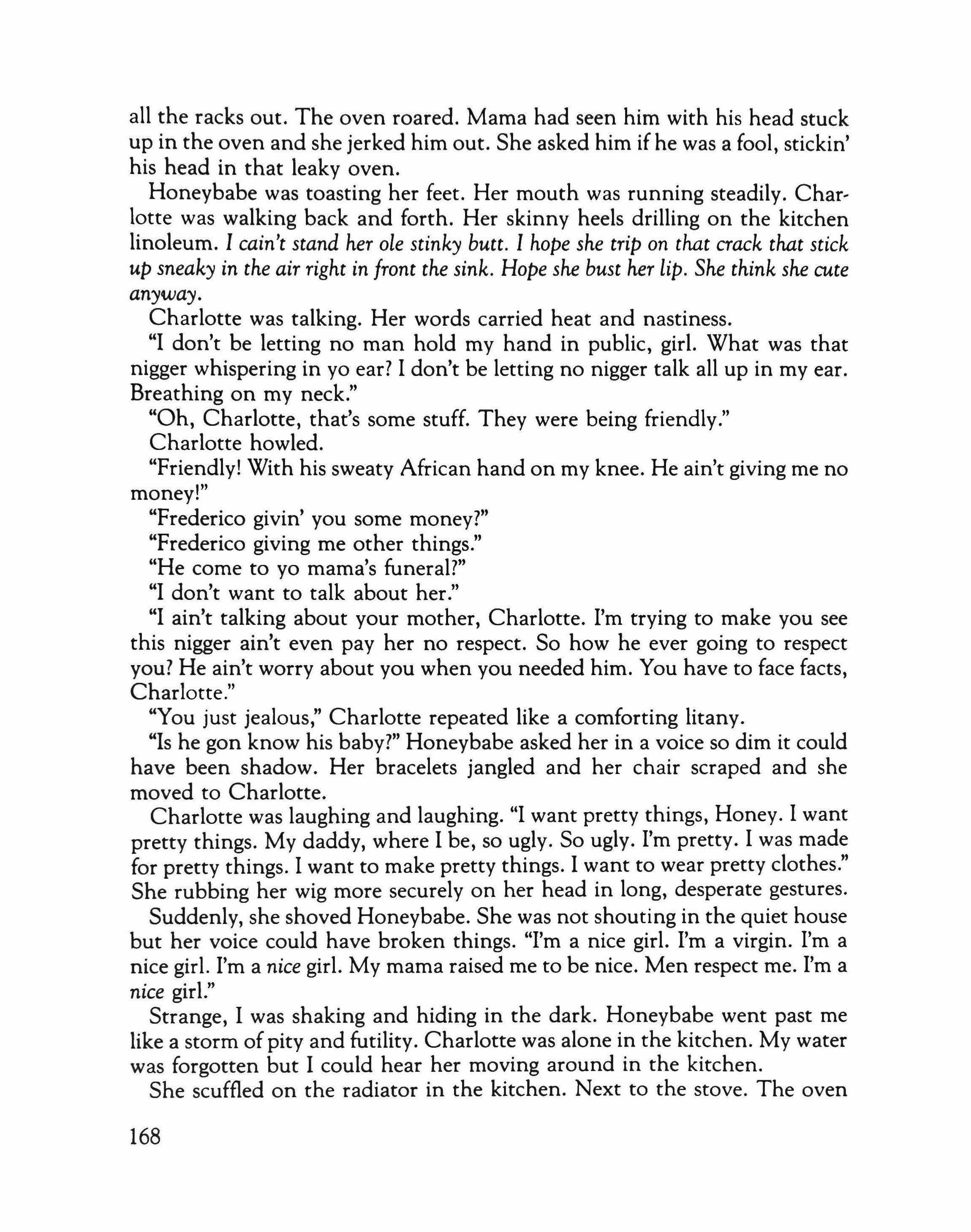
all the racks out. The oven roared. Mama had seen him with his head stuck up in the oven and she jerked him out. She asked him if he was a fool, stickin' his head in that leaky oven.
Honeybabe was toasting her feet. Her mouth was running steadily. Char, lotte was walking back and forth. Her skinny heels drilling on the kitchen linoleum. I cain't stand her ole stinky butt. I hope she trip on that crack that stick up sneaky in the air right in front the sink. Hope she bust her lip. She think she cute anyway.
Charlotte was talking. Her words carried heat and nastiness.
"I don't be letting no man hold my hand in public, girl. What was that nigger whispering in yo ear? I don't be letting no nigger talk all up in my ear. Breathing on my neck."
"Oh, Charlotte, that's some stuff. They were being friendly."
Charlotte howled.
"Friendly! With his sweaty African hand on my knee. He ain't giving me no money!"
"Frederico givin' you some money?"
"Frederico giving me other things."
"He come to yo mama's funeral?"
"I don't want to talk about her."
"I ain't talking about your mother, Charlotte. I'm trying to make you see this nigger ain't even pay her no respect. So how he ever going to respect you? He ain't worry about you when you needed him. You have to face facts, Charlotte."
"You just jealous," Charlotte repeated like a comforting litany.
"Is he gon know his baby?" Honeybabe asked her in a voice so dim it could have been shadow. Her bracelets jangled and her chair scraped and she moved to Charlotte.
Charlotte was laughing and laughing. "I want pretty things, Honey. I want pretty things. My daddy, where I be, so ugly. So ugly. I'm pretty. I was made for pretty things. I want to make pretty things. I want to wear pretty clothes." She rubbing her wig more securely on her head in long, desperate gestures. Suddenly, she shoved Honeybabe. She was not shouting in the quiet house but her voice could have broken things. "I'm a nice girl. I'm a virgin. I'm a nice girl. I'm a nice girl. My mama raised me to be nice. Men respect me. I'm a nice girl."
Strange, I was shaking and hiding in the dark. Honeybabe went past me like a storm ofpity and futility. Charlotte was alone in the kitchen. My water was forgotten but I could hear her moving around in the kitchen. She scuffled on the radiator in the kitchen. Next to the stove. The oven
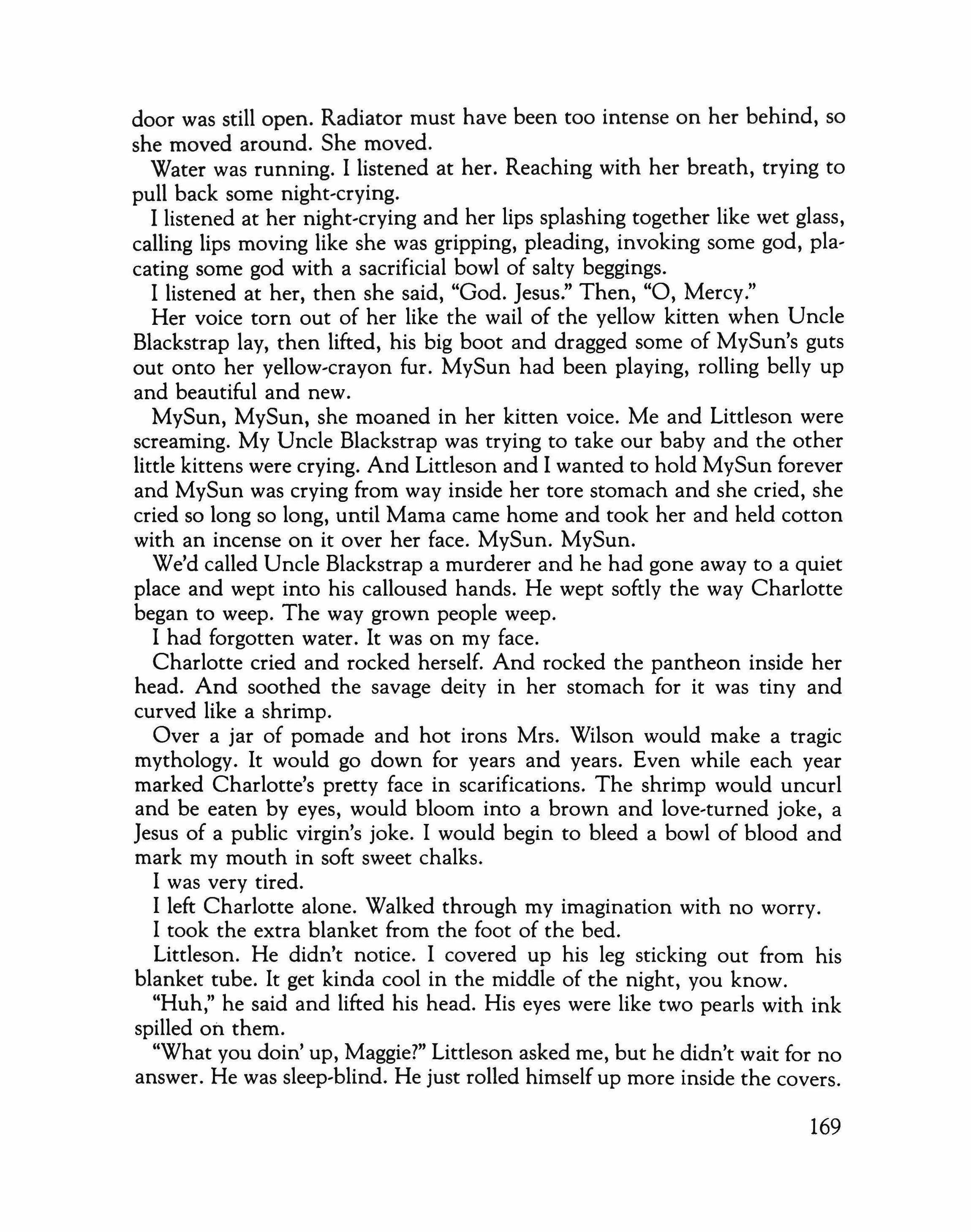
door was still open. Radiator must have been too intense on her behind, so she moved around. She moved.
Water was running. I listened at her. Reaching with her breath, trying to pull back some night-erving.
I listened at her night-erving and her lips splashing together like wet glass, calling lips moving like she was gripping, pleading, invoking some god, placating some god with a sacrificial bowl of salty beggings.
I listened at her, then she said, "God. Jesus." Then, "0, Mercy."
Her voice torn out of her like the wail of the yellow kitten when Uncle Blackstrap lay, then lifted, his big boot and dragged some of MySun's guts out onto her vellow-crayon fur. MySun had been playing, rolling belly up and beautiful and new.
MySun, MySun, she moaned in her kitten voice. Me and Littleson were screaming. My Uncle Blackstrap was trying to take our baby and the other little kittens were crying. And Littleson and I wanted to hold MySun forever and MySun was crying from way inside her tore stomach and she cried, she cried so long so long, until Mama came home and took her and held cotton with an incense on it over her face. MySun. MySun.
We'd called Uncle Blackstrap a murderer and he had gone away to a quiet place and wept into his calloused hands. He wept softly the way Charlotte began to weep. The way grown people weep.
I had forgotten water. It was on my face.
Charlotte cried and rocked herself. And rocked the pantheon inside her head. And soothed the savage deity in her stomach for it was tiny and curved like a shrimp.
Over a jar of pomade and hot irons Mrs. Wilson would make a tragic mythology. It would go down for years and years. Even while each year marked Charlotte's pretty face in scarifications. The shrimp would uncurl and be eaten by eyes, would bloom into a brown and love-turned joke, a Jesus of a public virgin's joke. I would begin to bleed a bowl of blood and mark my mouth in soft sweet chalks.
I was very tired.
I left Charlotte alone. Walked through my imagination with no worry. I took the extra blanket from the foot of the bed.
Littleson. He didn't notice. I covered up his leg sticking out from his blanket tube. It get kinda cool in the middle of the night, you know.
"Huh," he said and lifted his head. His eyes were like two pearls with ink spilled on them.
"What you doin' up, Maggie?" Littleson asked me, but he didn't wait for no answer. He was sleep-blind. He just rolled himself up more inside the covers.
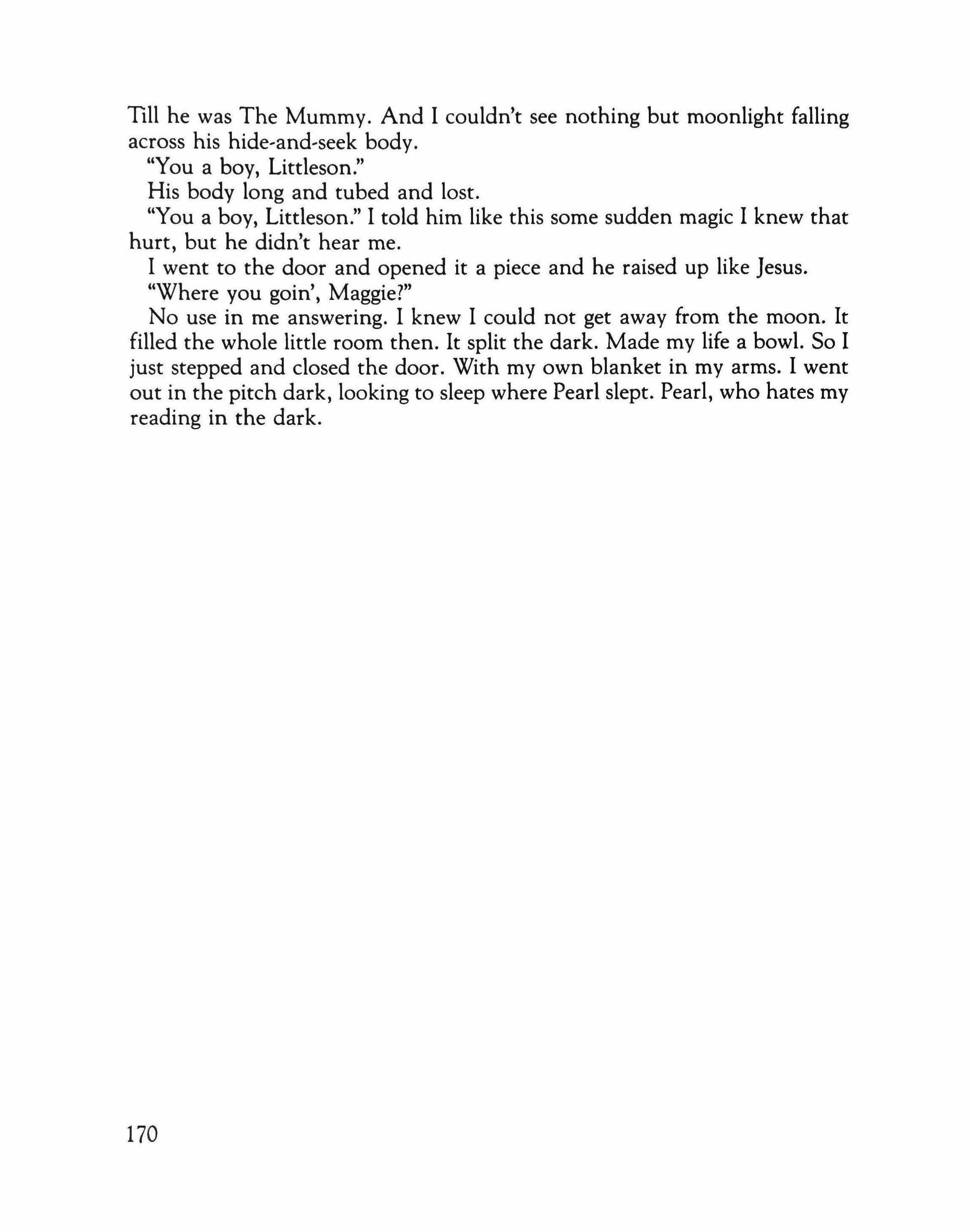
Till he was The Mummy. And I couldn't see nothing but moonlight falling across his hide-and-seek body.
"You a boy, Littleson."
His body long and tubed and lost.
"You a boy, Littleson." I told him like this some sudden magic I knew that hurt, but he didn't hear me.
I went to the door and opened it a piece and he raised up like Jesus.
"Where you goin', Maggie?"
No use in me answering. I knew I could not get away from the moon. It filled the whole little room then. It split the dark. Made my life a bowl. So I just stepped and closed the door. With my own blanket in my arms. I went out in the pitch dark, looking to sleep where Pearl slept. Pearl, who hates my reading in the dark.


We called them bats. Backstreets of Chicago, evening wind, the howls began. School weathered, odd jobs punched & supper down, they'd flock the alley hoops beneath our blackened walls of brick, knowing to a stroke, in almost-dark, when brother bats would come-just time to shoot for teams before the alley roofs were gone. And then the howls began, till midnight never ceased on those hot summers in Chicago, hovered rising, falling in that city's constant wind.
Evenings out to grab a bite or come home late to mount the wooden stairs that climbed the backs
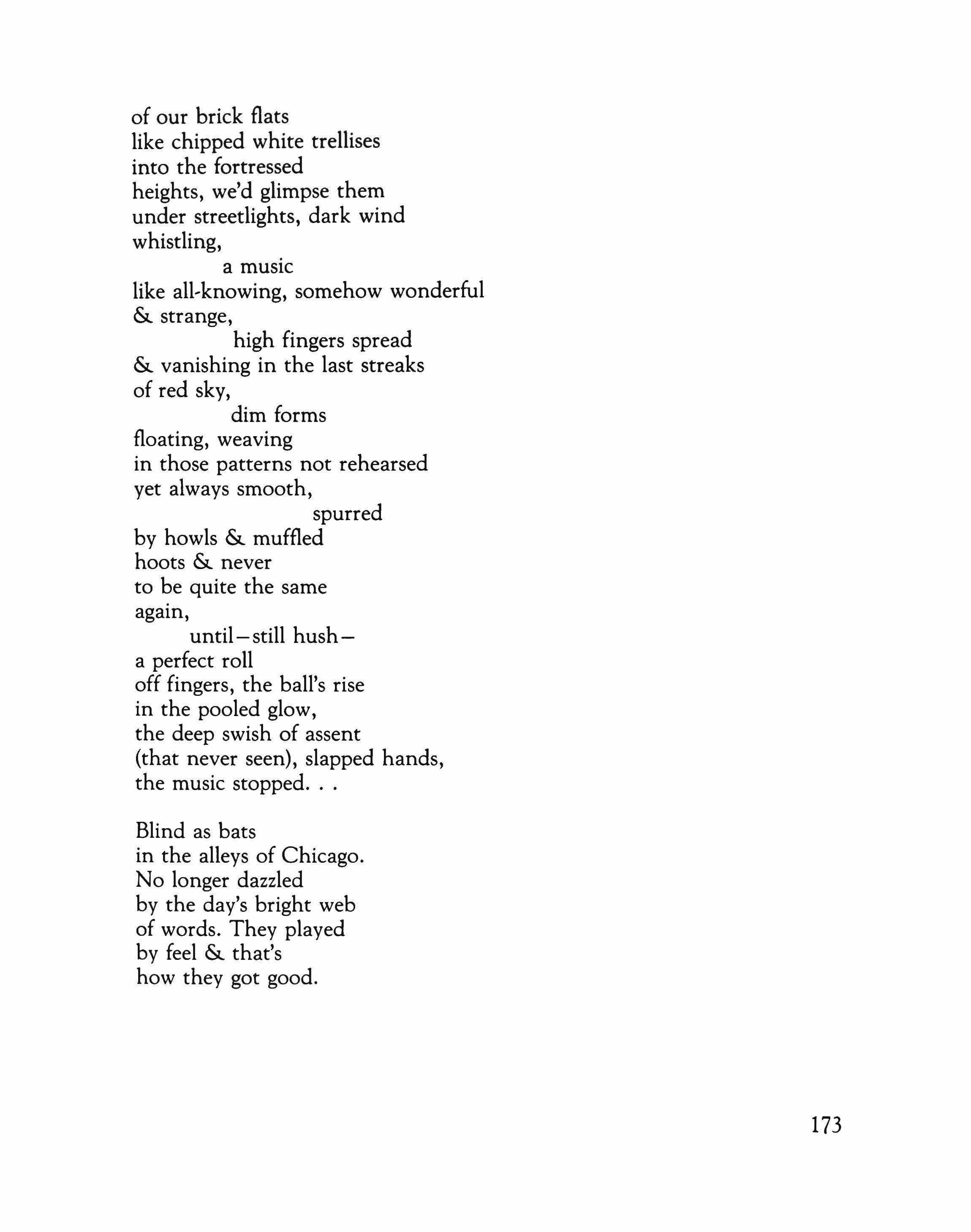
of our brick flats like chipped white trellises into the fortressed heights, we'd glimpse them under streetlights, dark wind whistling, a music like all-knowing, somehow wonderful & strange, high fingers spread & vanishing in the last streaks of red sky, dim forms floating, weaving in those patterns not rehearsed yet always smooth, spurred by howls & muffled hoots & never to be quite the same again, until-still husha perfect roll off fingers, the ball's rise in the pooled glow, the deep swish of assent (that never seen), slapped hands, the music stopped
Blind as bats in the alleys of Chicago. No longer dazzled by the day's bright web of words. They played by feel & that's how they got good.
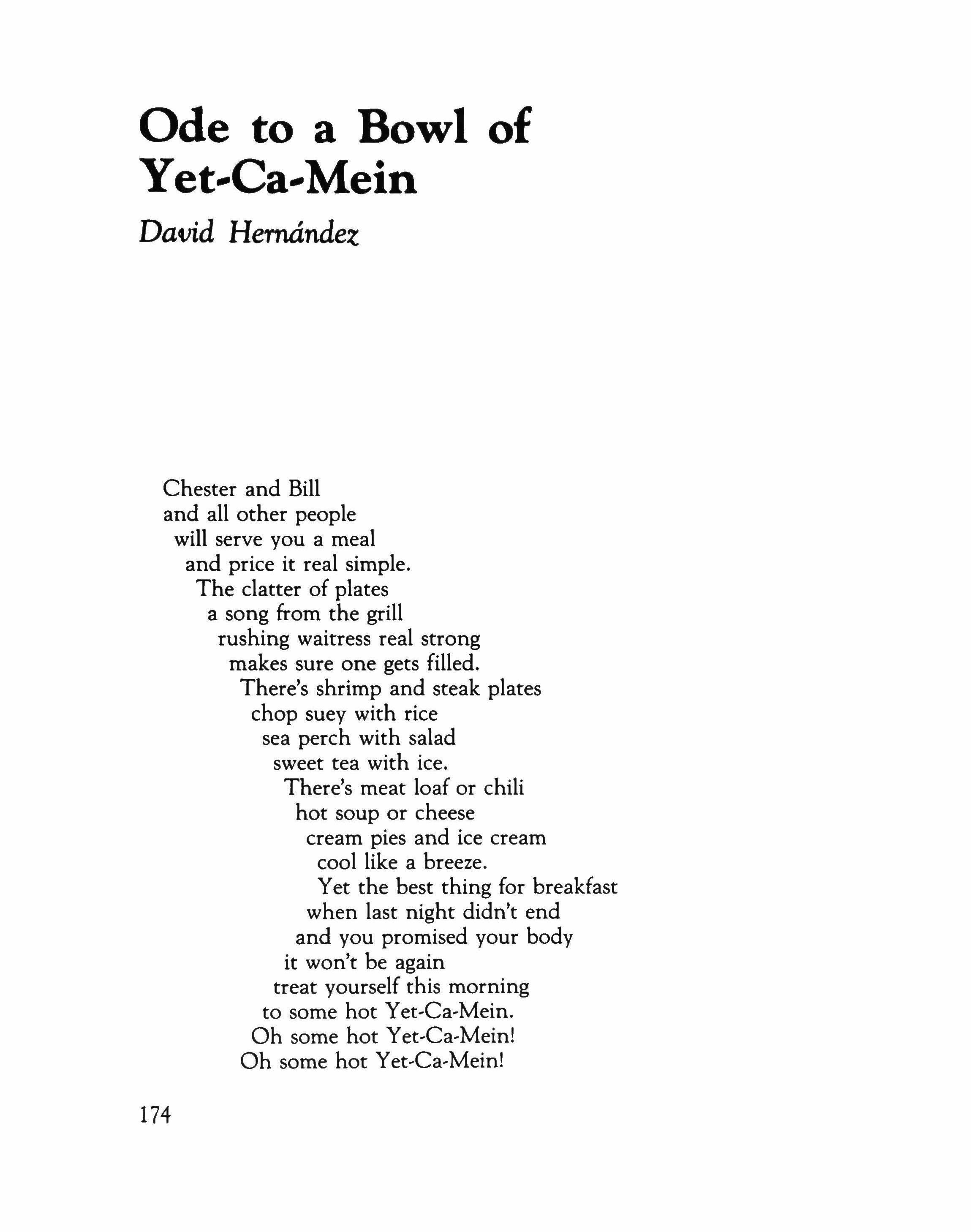
Chester and Bill and all other people will serve you a meal and price it real simple. The clatter of plates a song from the grill rushing waitress real strong makes sure one gets filled. There's shrimp and steak plates chop suey with rice sea perch with salad sweet tea with ice. There's meat loaf or chili hot soup or cheese cream pies and ice cream cool like a breeze. Yet the best thing for breakfast when last night didn't end and you promised your body it won't be again treat yourself this morning to some hot Yet-Ca-Mein. Oh some hot Yet-Ca-Meinl Oh some hot Yet,Ca,Mein!
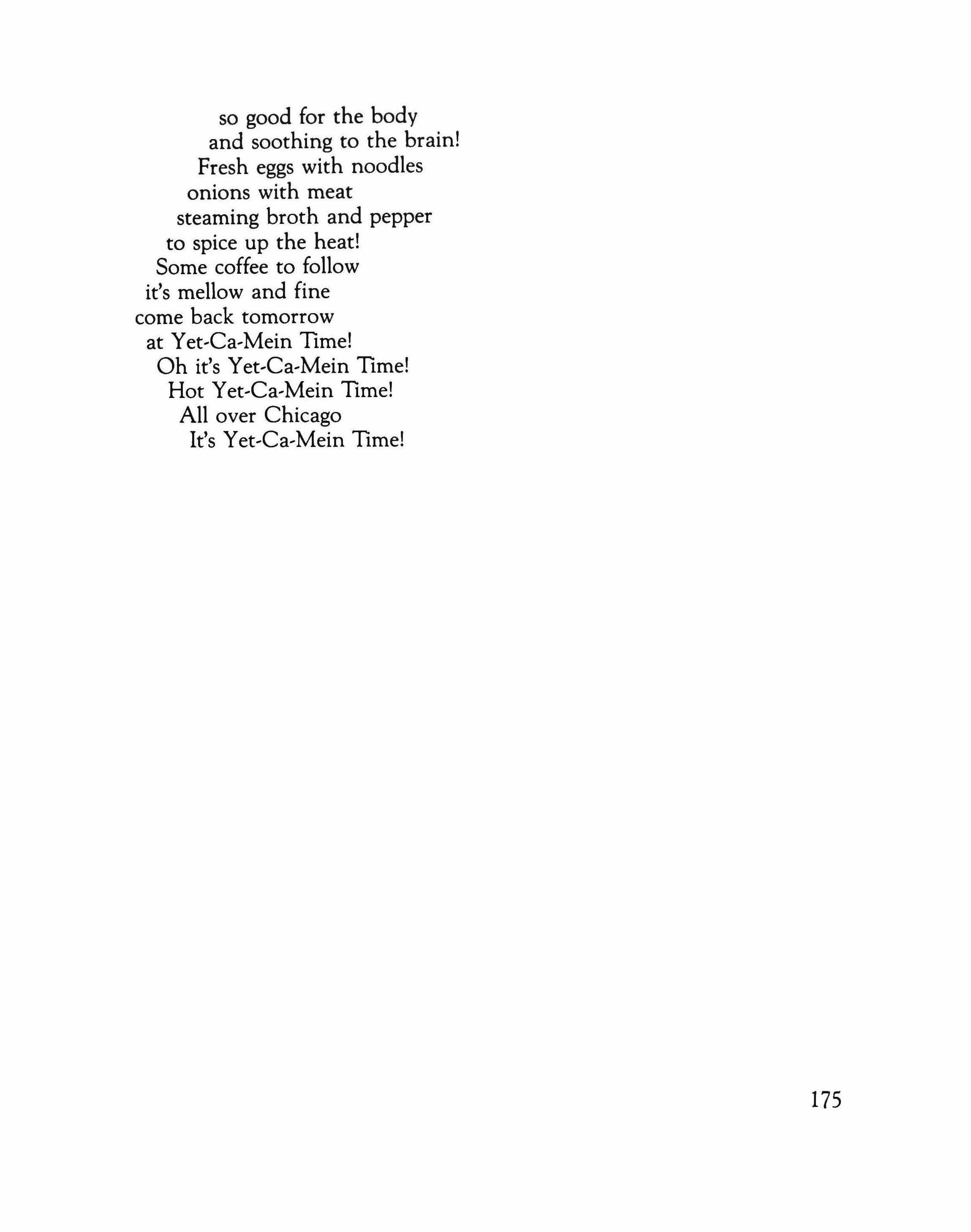
so good for the body and soothing to the brain!
Fresh eggs with noodles onions with meat steaming broth and pepper to spice up the heat!
Some coffee to follow it's mellow and fine come back tomorrow at Yet�Ca�Mein Time!
Oh it's Yet-Ca-Mein Time! Hot Yet�Ca�Mein Time!
All over Chicago It's Yet-Ca-Mein Time!
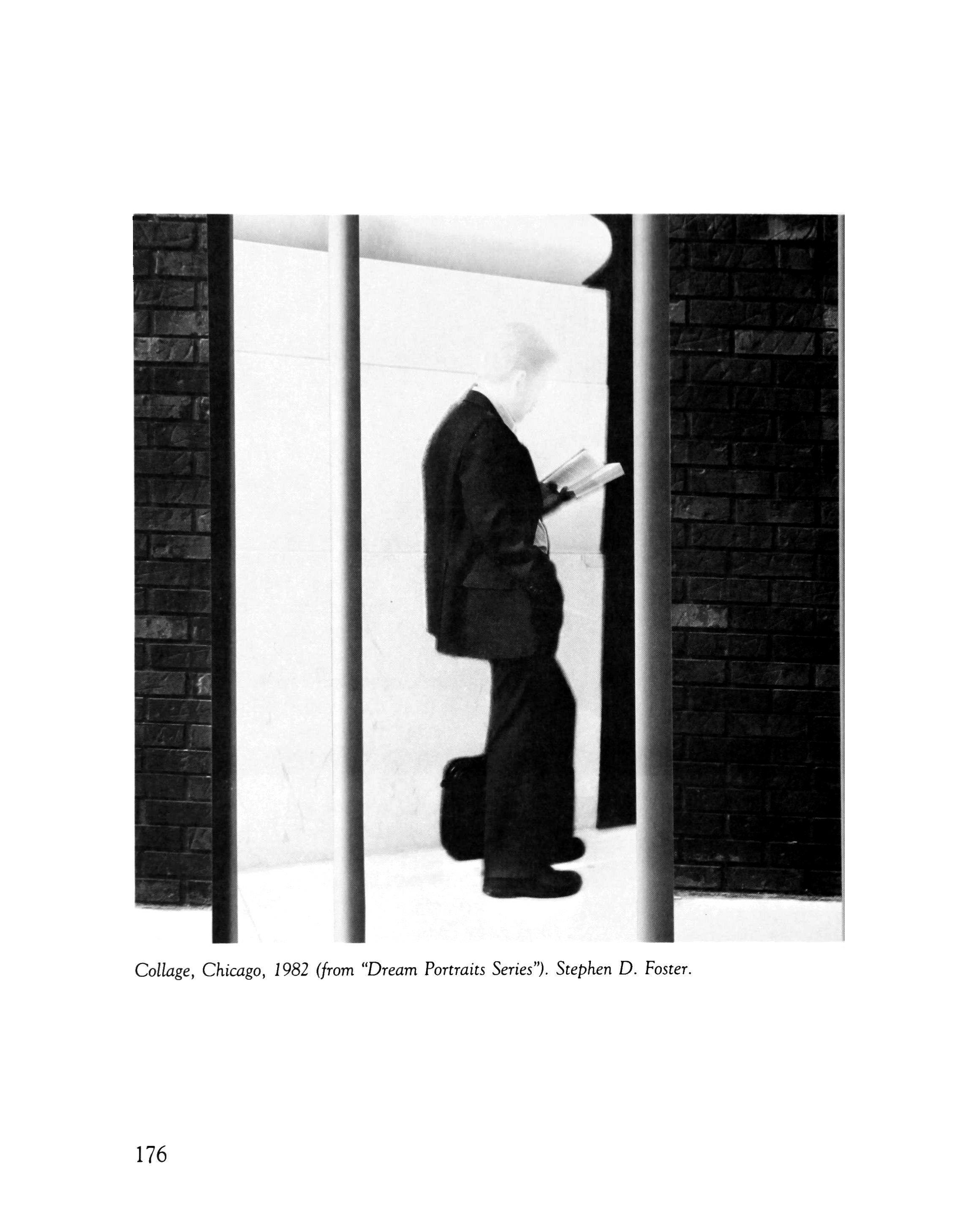
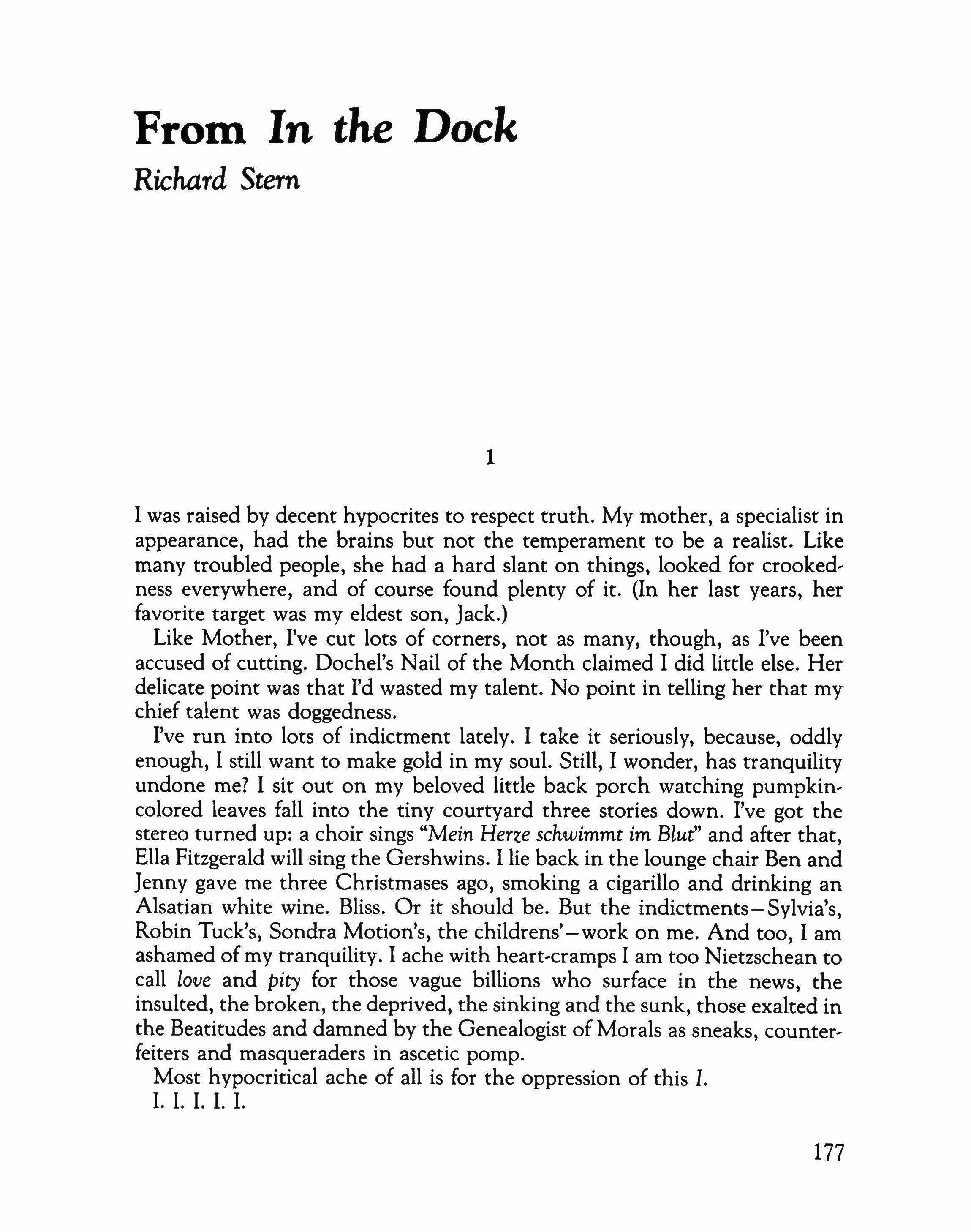
I was raised by decent hypocrites to respect truth. My mother, a specialist in appearance, had the brains but not the temperament to be a realist. Like many troubled people, she had a hard slant on things, looked for crooked, ness everywhere, and of course found plenty of it. (In her last years, her favorite target was my eldest son, Jack.)
Like Mother, I've cut lots of corners, not as many, though, as I've been accused of cutting. Dochel's Nail of the Month claimed I did little else. Her delicate point was that I'd wasted my talent. No point in telling her that my chief talent was doggedness.
I've run into lots of indictment lately. I take it seriously, because, oddly enough, I still want to make gold in my soul. Still, I wonder, has tranquility undone me? I sit out on my beloved little back porch watching pumpkin, colored leaves fall into the tiny courtyard three stories down. I've got the stereo turned up: a choir sings "Mein Herze schwimmt im Blut" and after that, Ella Fitzgerald will sing the Gershwins. I lie back in the lounge chair Ben and Jenny gave me three Christmases ago, smoking a cigarillo and drinking an Alsatian white wine. Bliss. Or it should be. But the indictments-Sylvia's, Robin Tuck's, Sondra Motion's, the childrens'-work on me. And too, I am ashamed of my tranquility. I ache with heart-cramps I am too Nietzschean to call love and pity for those vague billions who surface in the news, the insulted, the broken, the deprived, the sinking and the sunk, those exalted in the Beatitudes and damned by the Genealogist of Morals as sneaks, counter, feiters and masqueraders in ascetic pomp.
Most hypocritical ache of all is for the oppression of this 1. 1.1.1.1.1.
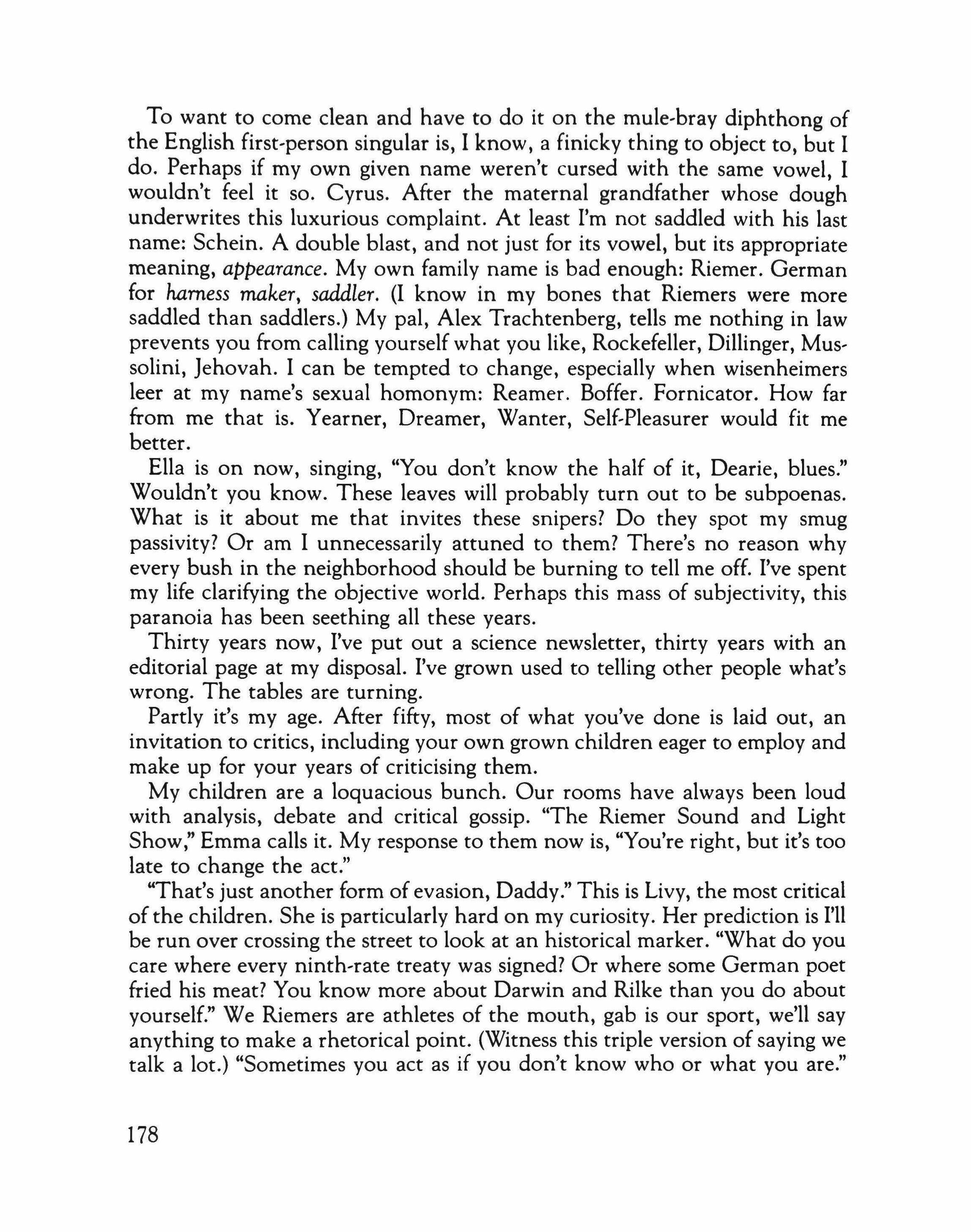
To want to come clean and have to do it on the mule-bray diphthong of the English first-person singular is, 1 know, a finicky thing to object to, but 1 do. Perhaps if my own given name weren't cursed with the same vowel, 1 wouldn't feel it so. Cyrus. After the maternal grandfather whose dough underwrites this luxurious complaint. At least I'm not saddled with his last name: Schein. A double blast, and not just for its vowel, but its appropriate meaning, appearance. My own family name is bad enough: Riemer. German for harness maker, saddler. (1 know in my bones that Riemers were more saddled than saddlers.) My pal, Alex Trachtenberg, tells me nothing in law prevents you from calling yourself what you like, Rockefeller, Dillinger, Mus, solini, Jehovah. 1 can be tempted to change, especially when wisenheimers leer at my name's sexual homonym: Reamer. Boffer. Fornicator. How far from me that is. Yearner, Dreamer, Wanter, Self-Pleasurer would fit me better.
Ella is on now, singing, "You don't know the half of it, Dearie, blues." Wouldn't you know. These leaves will probably turn out to be subpoenas. What is it about me that invites these snipers? Do they spot my smug passivity? Or am 1 unnecessarily attuned to them? There's no reason why every bush in the neighborhood should be burning to tell me off. I've spent my life clarifying the objective world. Perhaps this mass of subjectivity, this paranoia has been seething all these years.
Thirty years now, I've put out a science newsletter, thirty years with an editorial page at my disposal. I've grown used to telling other people what's wrong. The tables are turning.
Partly it's my age. After fifty, most of what you've done is laid out, an invitation to critics, including your own grown children eager to employ and make up for your years of criticising them.
My children are a loquacious bunch. Our rooms have always been loud with analysis, debate and critical gossip. "The Riemer Sound and Light Show," Emma calls it. My response to them now is, "You're right, but it's too late to change the act."
"That's just another form of evasion, Daddy." This is Livy, the most critical of the children. She is particularly hard on my curiosity. Her prediction is I'll be run over crossing the street to look at an historical marker. "What do you care where every ninth-rate treaty was signed? Or where some German poet fried his meat? You know more about Darwin and Rilke than you do about yourself." We Riemers are athletes of the mouth, gab is our sport, we'll say anything to make a rhetorical point. (Witness this triple version of saying we talk a lot.) "Sometimes you act as if you don't know who or what you are."
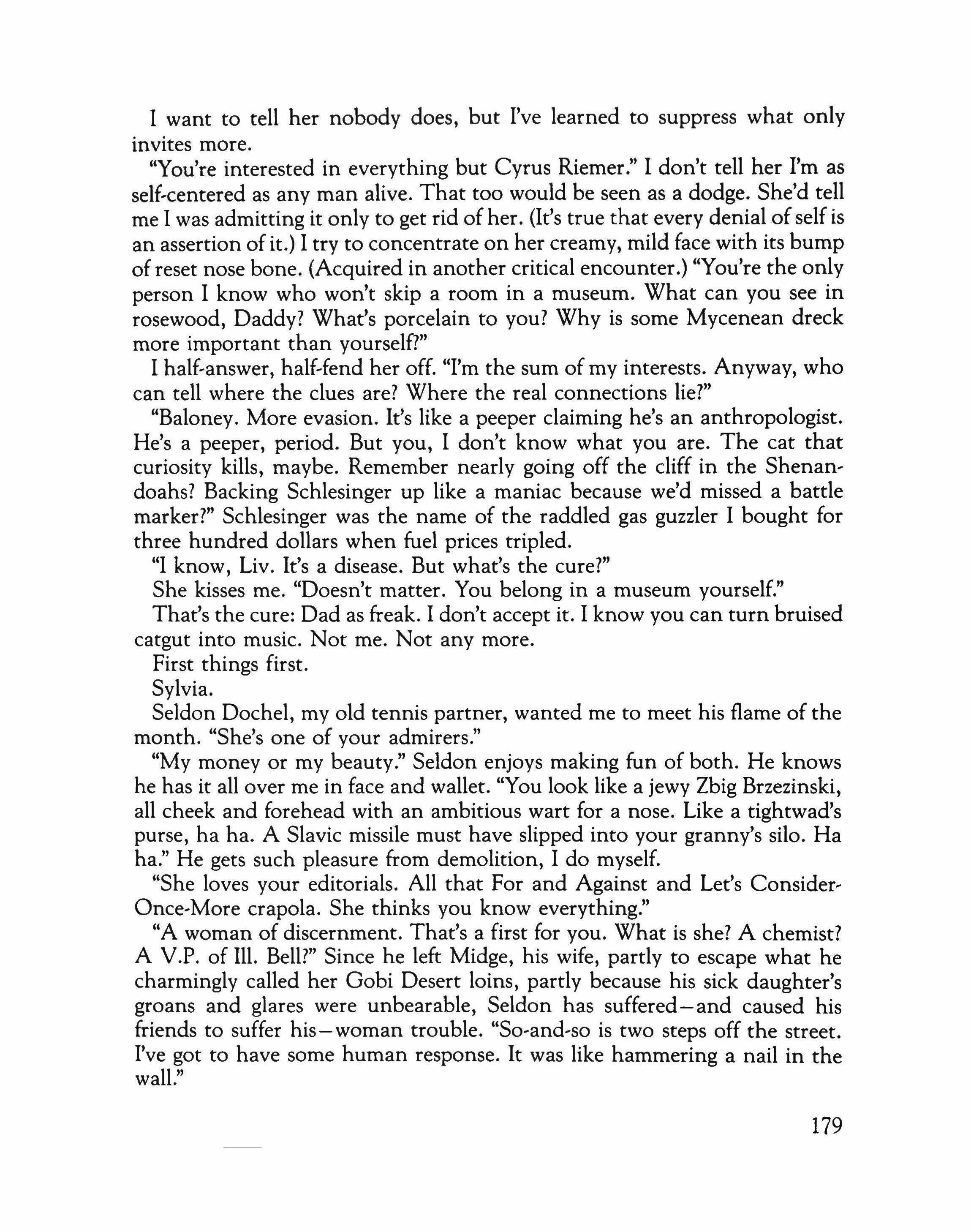
I want to tell her nobody does, but I've learned to suppress what only invites more.
"You're interested in everything but Cyrus Riemer." I don't tell her I'm as self-centered as any man alive. That too would be seen as a dodge. She'd tell me I was admitting it only to get rid of her. (It's true that every denial ofself is an assertion of it.) I try to concentrate on her creamy, mild face with its bump of reset nose bone. (Acquired in another critical encounter.) "You're the only person I know who won't skip a room in a museum. What can you see in rosewood, Daddy? What's porcelain to you? Why is some Mvcenean dreck more important than yourselfl"
I half-answer, half-fend her off. "I'm the sum of my interests. Anyway, who can tell where the clues are? Where the real connections lie?"
"Baloney. More evasion. It's like a peeper claiming he's an anthropologist. He's a peeper, period. But you, I don't know what you are. The cat that curiosity kills, maybe. Remember nearly going off the cliff in the Shenandoahs? Backing Schlesinger up like a maniac because we'd missed a battle marker?" Schlesinger was the name of the raddled gas guzzler I bought for three hundred dollars when fuel prices tripled.
"I know, Liv. It's a disease. But what's the cure?"
She kisses me. "Doesn't matter. You belong in a museum yourself."
That's the cure: Dad as freak. I don't accept it. I know you can turn bruised catgut into music. Not me. Not any more.
First things first.
Sylvia.
Seldon Dochel, myoid tennis partner, wanted me to meet his flame of the month. "She's one of your admirers."
"My money or my beauty." Seldon enjoys making fun of both. He knows he has it all over me in face and wallet. "You look like a jewy Zbig Brzezinski, all cheek and forehead with an ambitious wart for a nose. Like a tightwad's purse, ha ha. A Slavic missile must have slipped into your granny's silo. Ha ha." He gets such pleasure from demolition, I do myself.
"She loves your editorials. All that For and Against and Let's Consider, Once-More crapola. She thinks you know everything."
"A woman of discernment. That's a first for you. What is she? A chemist?
A V.P. of Ill. Bell?" Since he left Midge, his wife, partly to escape what he charmingly called her Gobi Desert loins, partly because his sick daughter's groans and glares were unbearable, Seldon has suffered - and caused his friends to suffer his - woman trouble. "So-and-so is two steps off the street. I've got to have some human response. It was like hammering a nail in the wall."
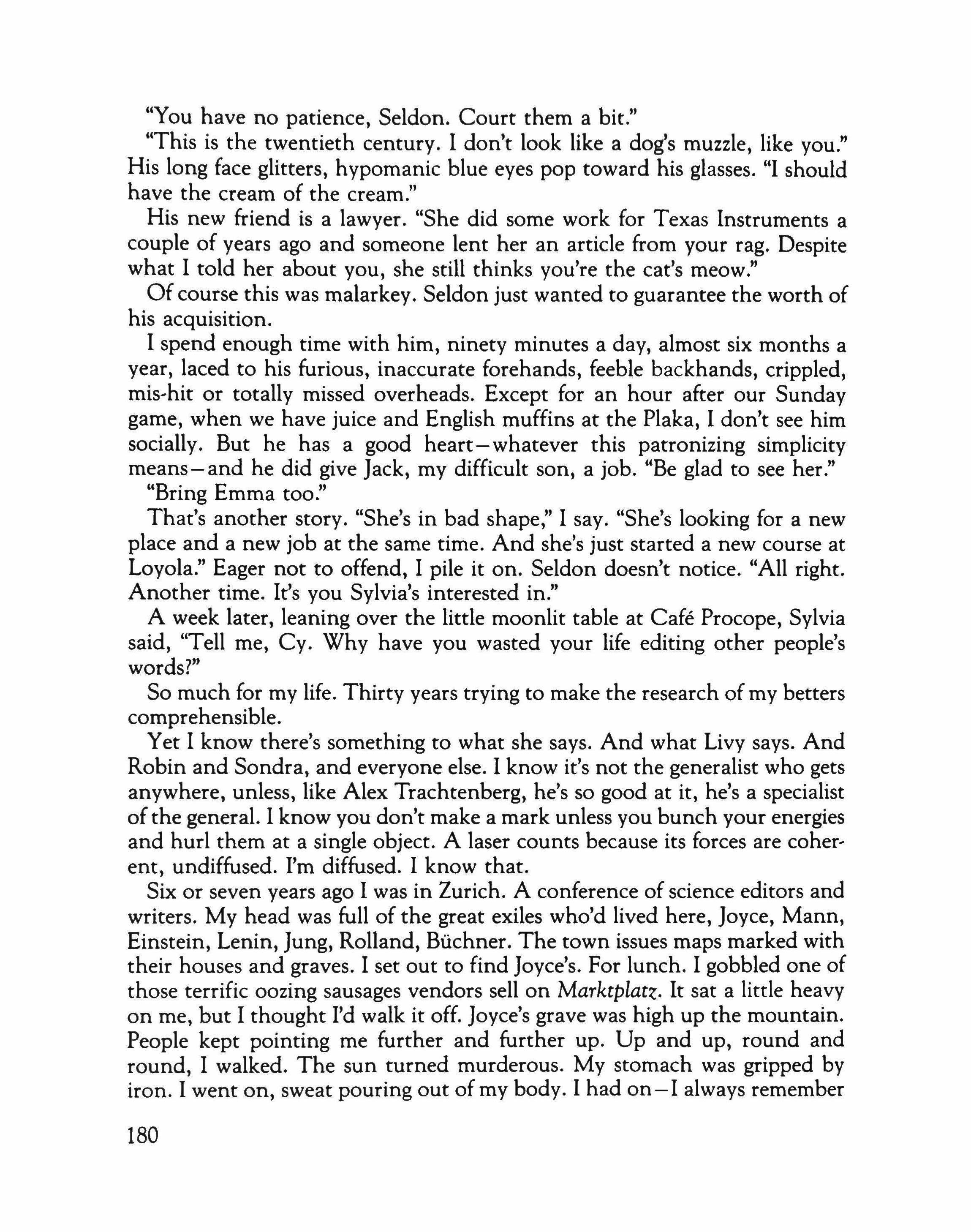
"You have no patience, Seldon. Court them a bit."
"This is the twentieth century. I don't look like a dog's muzzle, like you." His long face glitters, hypomanic blue eyes pop toward his glasses. "I should have the cream of the cream."
His new friend is a lawyer. "She did some work for Texas Instruments a couple of years ago and someone lent her an article from your rag. Despite what I told her about you, she still thinks you're the eat's meow."
Of course this was malarkey. Seldon just wanted to guarantee the worth of his acquisition.
I spend enough time with him, ninety minutes a day, almost six months a year, laced to his furious, inaccurate forehands, feeble backhands, crippled, mis-hit or totally missed overheads. Except for an hour after our Sunday game, when we have juice and English muffins at the Plaka, I don't see him socially. But he has a good heart - whatever this patronizing simplicity means-and he did give Jack, my difficult son, a job. "Be glad to see her."
"Bring Emma too."
That's another story. "She's in bad shape," I say. "She's looking for a new place and a new job at the same time. And she's just started a new course at Loyola." Eager not to offend, I pile it on. Seldon doesn't notice. "All right. Another time. It's you Sylvia's interested in."
A week later, leaning over the little moonlit table at Cafe Procope, Sylvia said, "Tell me, Cy. Why have you wasted your life editing other people's words?"
So much for my life. Thirty years trying to make the research of my betters comprehensible.
Yet I know there's something to what she says. And what Livy says. And Robin and Sondra, and everyone else. I know it's not the generalist who gets anywhere, unless, like Alex Trachtenberg, he's so good at it, he's a specialist ofthe general. I know you don't make a mark unless you bunch your energies and hurl them at a single object. A laser counts because its forces are coherent, undiffused. I'm diffused. I know that.
Six or seven years ago I was in Zurich. A conference of science editors and writers. My head was full of the great exiles who'd lived here, Joyce, Mann, Einstein, Lenin, [ung, Rolland, Buchner. The town issues maps marked with their houses and graves. I set out to find Joyce's. For lunch. I gobbled one of those terrific oozing sausages vendors sell on Marktplatz. It sat a little heavy on me, but I thought I'd walk it off. Joyce's grave was high up the mountain. People kept pointing me further and further up. Up and up, round and round, I walked. The sun turned murderous. My stomach was gripped by iron. I went on, sweat pouring out of my body. I had on - I always remember

what I wear and where I got it, and this isn't irrelevant to my nature. I'm a walking diary. My clothes, lousy in themselves, are bought all over. Anyway, I had on this pair of light trousers I'd bought in Rio on Botofogo during another conference when the heat was staggering. The belt I'd bought in Turin, the shirt in England when the English still made shirts that covered your tail. Anyway, there I was in my silvery olive pants, cloth-and-leather belt, and a blue shirt, everything soaked in what I didn't realize was fever sweat, pushing one foot in front of the other, when suddenly I couldn't go on. I leaned against a chestnut tree, the shade was delicious, but my belly was knives and fire. "I'm nuts:' I told myself. "What in hell am I doing? I'm killing myself trying to see another man's grave. His grave's going to be mine. What the hell is it to me anyway? The man himself never even saw it." Now Joyce is one of my hundred-maybe thousand-heroes. Leonardo, Dante, Einstein, Shakespeare, Montaigne, Rilke, I have the same ones every sensible human has, plus a few hundred odd ones, but what was the sense ofthis? What did it have to do with me? With my life? My energy? What was it going to tell me about the world? That at least was the excuse I could give Livy about rosewood or porcelain, about Mycenae or sodium-potassium exchanges in a nerve axon, but this heartsick drive up this hellish hill had no purpose except to show me I was killing myself for something that had nothing to do with me. It was just another form of my central curse: wasting time.
You can ask what I was taking time from. (Well, there is something.)
Seldon said, "You're going to get on with Sylvia. And I don't mean get it on. Ha ha. She's a terrific lady. Sensitive as grass. Knows what you're think, ing before you do. And not trying to get her name in the Penthouse Forum. Nothing spectacular there, just nice old-fashioned chewing-and-screwing, Not like those, those camels I led around the Sahara. Or froze my arse off with in their interior igloos. You and she are going to hit it off. She's the reason I've been so sharp lately. The way she makes me feel I could run Borg's little Swedish heinie out of Wimbledon. Not even your junk can throw me."
Seldon goes mad when I start dribbling shots over the net cord, then lobbing over his head after he's made his tankish forward charge. I do enjoy seeing him back-pedal on his thick pins, windmilling wildly, the yellow ball hitting him on the head. But I have to be careful. Sometimes he will stop in the middle of a point and glare his hatred across the net at me. The high teeth clamp, the veins bulge, he may slap his forehead or punch his thighs. I've seen him stamp his own foot. He may say quietly, "Your junk is killing me, Riemer." He walks off the court to the long black bag which contains his equipment and analgesics (antibiotic paste, tape, bandages, Valium, cans of cold pop, gut strings with tools to insert them, a carton ofhigh tar cigarettes).
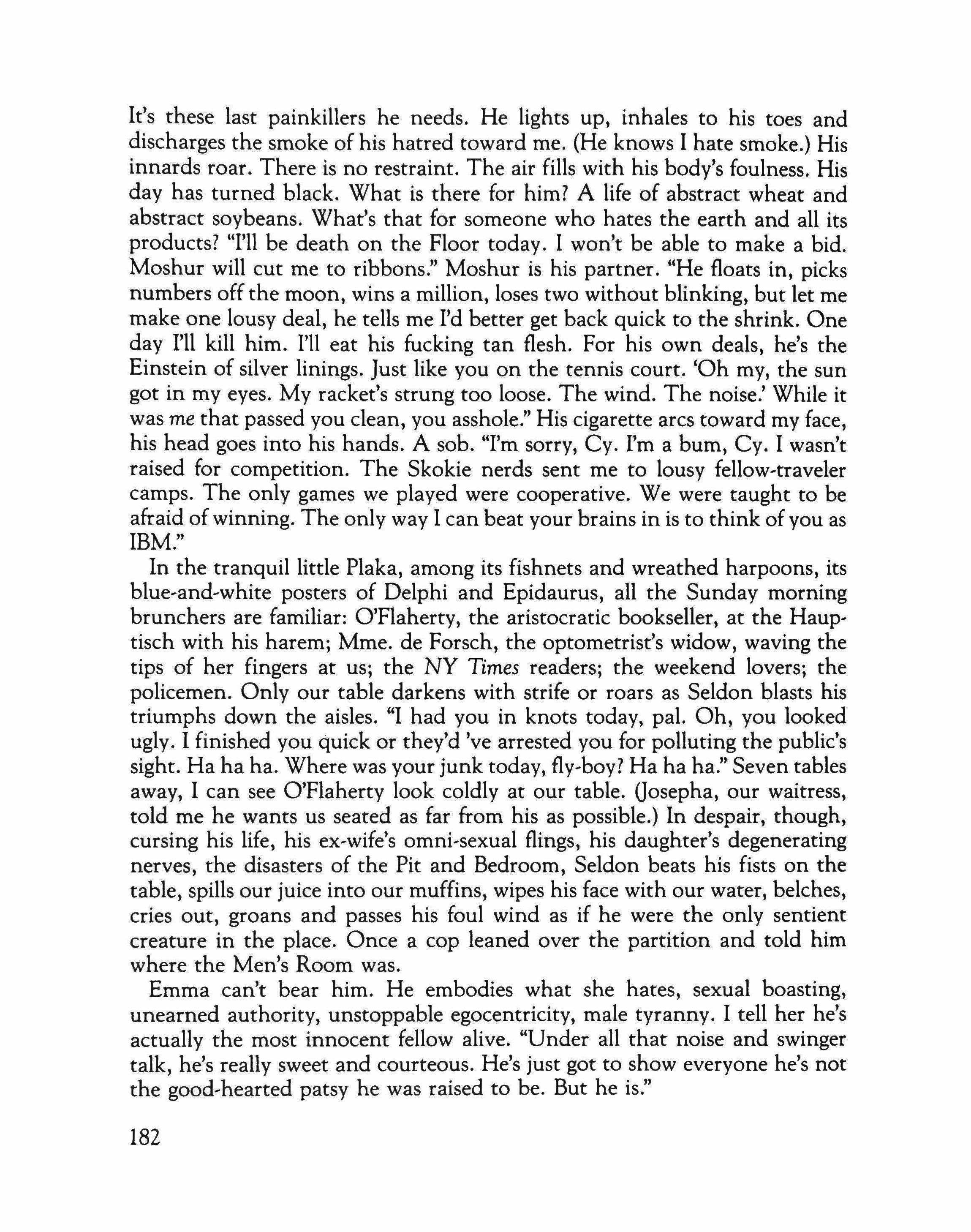
It's these last painkillers he needs. He lights up, inhales to his toes and discharges the smoke of his hatred toward me. (He knows I hate smoke.) His innards roar. There is no restraint. The air fills with his body's foulness. His day has turned black. What is there for him? A life of abstract wheat and abstract soybeans. What's that for someone who hates the earth and all its products? "I'll be death on the Floor today. I won't be able to make a bid. Moshur will cut me to ribbons." Moshur is his partner. "He floats in, picks numbers off the moon, wins a million, loses two without blinking, but let me make one lousy deal, he tells me I'd better get back quick to the shrink. One day I'll kill him. I'll eat his fucking tan flesh. For his own deals, he's the Einstein of silver linings. Just like you on the tennis court. 'Oh my, the sun got in my eyes. My racket's strung too loose. The wind. The noise.' While it was me that passed you clean, you asshole." His cigarette arcs toward my face, his head goes into his hands. A sob. "I'm sorry, Cy. I'm a bum, Cy. I wasn't raised for competition. The Skokie nerds sent me to lousy fellow-traveler camps. The only games we played were cooperative. We were taught to be afraid ofwinning. The only way I can beat your brains in is to think of you as IBM."
In the tranquil little Plaka, among its fishnets and wreathed harpoons, its blue-and-white posters of Delphi and Epidaurus, all the Sunday morning brunchers are familiar: O'Flahertv, the aristocratic bookseller, at the Hauptisch with his harem; Mme. de Forsch, the optometrist's widow, waving the tips of her fingers at us; the NY Times readers; the weekend lovers; the policemen. Only our table darkens with strife or roars as Seldon blasts his triumphs down the aisles. "I had you in knots today, pal. Oh, you looked ugly. I finished you quick or they'd 've arrested you for polluting the public's sight. Ha ha ha. Where was your junk today, flv-boy? Ha ha ha." Seven tables away, I can see O'Flaherty look coldly at our table. (losepha, our waitress, told me he wants us seated as far from his as possible.) In despair, though, cursing his life, his ex-wife's omni-sexual flings, his daughter's degenerating nerves, the disasters of the Pit and Bedroom, Seldon beats his fists on the table, spills our juice into our muffins, wipes his face with our water, belches, cries out, groans and passes his foul wind as if he were the only sentient creature in the place. Once a cop leaned over the partition and told him where the Men's Room was.
Emma can't bear him. He embodies what she hates, sexual boasting, unearned authority, unstoppable egocentricity, male tyranny. I tell her he's actually the most innocent fellow alive. "Under all that noise and swinger talk, he's really sweet and courteous. He's just got to show everyone he's not the good-hearted patsy he was raised to be. But he is."
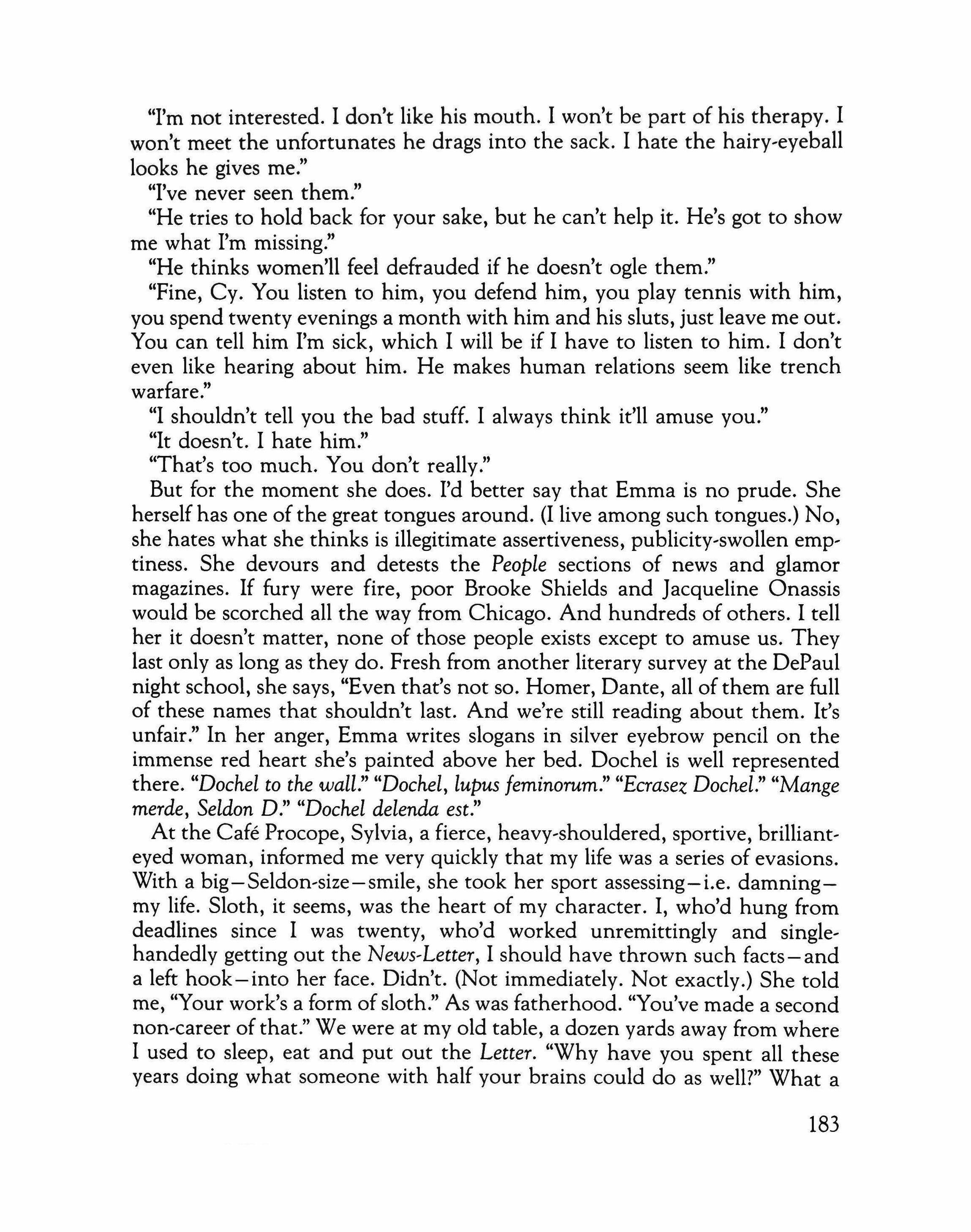
"I'm not interested. I don't like his mouth. I won't be part of his therapy. I won't meet the unfortunates he drags into the sack. I hate the hairy-eyeball looks he gives me."
"I've never seen them."
"He tries to hold back for your sake, but he can't help it. He's got to show me what I'm missing."
"He thinks women'll feel defrauded if he doesn't ogle them."
"Fine, Cy. You listen to him, you defend him, you play tennis with him, you spend twenty evenings a month with him and his sluts, just leave me out. You can tell him I'm sick, which I will be if I have to listen to him. I don't even like hearing about him. He makes human relations seem like trench warfare."
"I shouldn't tell you the bad stuff. I always think it'll amuse you."
"It doesn't. I hate him."
"That's too much. You don't really."
But for the moment she does. I'd better say that Emma is no prude. She herself has one of the great tongues around. (I live among such tongues.) No, she hates what she thinks is illegitimate assertiveness, publicity-swollen ernptiness. She devours and detests the People sections of news and glamor magazines. If fury were fire, poor Brooke Shields and Jacqueline Onassis would be scorched all the way from Chicago. And hundreds of others. I tell her it doesn't matter, none of those people exists except to amuse us. They last only as long as they do. Fresh from another literary survey at the DePaul night school, she says, "Even that's not so. Homer, Dante, all of them are full of these names that shouldn't last. And we're still reading about them. It's unfair." In her anger, Emma writes slogans in silver eyebrow pencil on the immense red heart she's painted above her bed. Dochel is well represented there. "Dochel to the wall." "Dochel, lupus /eminorum." "Ecrasez Dochel." "Mange merde, Seldon D." "Dochel delenda est."
At the Cafe Procope, Sylvia, a fierce, heavy-shouldered, sportive, brilliant, eyed woman, informed me very quickly that my life was a series of evasions. With a big - Selden-size - smile, she took her sport assessing - i.e. damningmy life. Sloth, it seems, was the heart of my character. I, who'd hung from deadlines since I was twenty, who'd worked unremittingly and single' handedly getting out the News-Letter, I should have thrown such facts-and a left hook-into her face. Didn't. (Not immediately. Not exactly.) She told me, "Your work's a form of sloth." As was fatherhood. "You've made a second non-career of that." We were at myoId table, a dozen yards away from where I used to sleep, eat and put out the Letter. "Why have you spent all these years doing what someone with half your brains could do as well?" What a
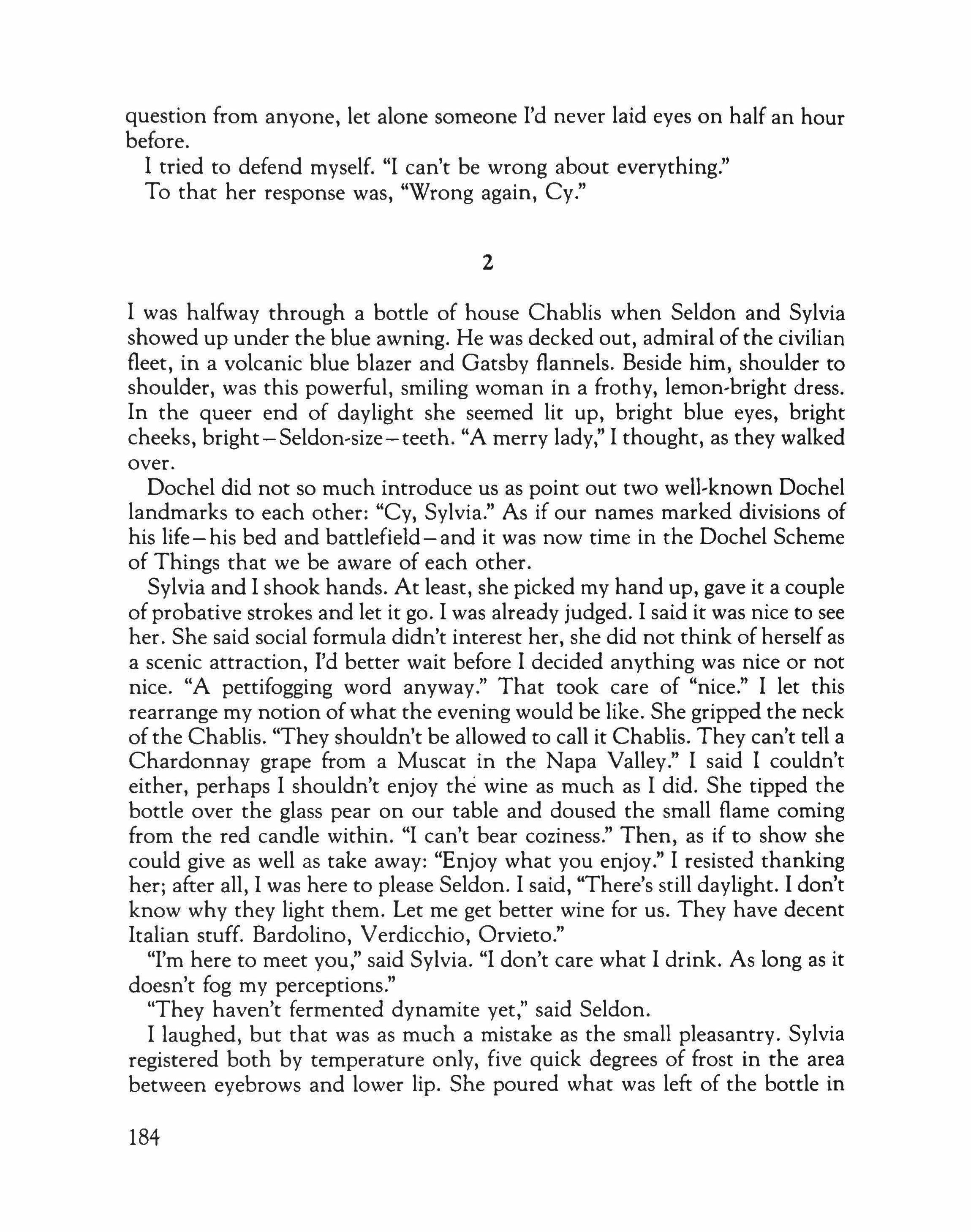
question from anyone, let alone someone I'd never laid eyes on half an hour before.
I tried to defend myself. "I can't be wrong about everything."
To that her response was, "Wrong again, Cy."
2
I was halfway through a bottle of house Chablis when Seldon and Sylvia showed up under the blue awning. He was decked out, admiral of the civilian fleet, in a volcanic blue blazer and Gatsbv flannels. Beside him, shoulder to shoulder, was this powerful, smiling woman in a frothy, lemon-bright dress. In the queer end of daylight she seemed lit up, bright blue eyes, bright cheeks, bright=Seldon-size-cteeth. "A merry lady," I thought, as they walked over.
Dochel did not so much introduce us as point out two well-known Dochel landmarks to each other: "Cy, Sylvia." As if our names marked divisions of his life-his bed and battlefield-and it was now time in the Dochel Scheme of Things that we be aware of each other.
Sylvia and I shook hands. At least, she picked my hand up, gave it a couple ofprobative strokes and let it go. I was already judged. I said it was nice to see her. She said social formula didn't interest her, she did not think of herself as a scenic attraction, I'd better wait before I decided anything was nice or not nice. "A pettifogging word anyway." That took care of "nice." I let this rearrange my notion of what the evening would be like. She gripped the neck of the Chablis. "They shouldn't be allowed to call it Chablis. They can't tell a Chardonnay grape from a Muscat in the Napa Valley." I said I couldn't either, perhaps I shouldn't enjoy the wine as much as I did. She tipped the bottle over the glass pear on our table and doused the small flame coming from the red candle within. "I can't bear coziness." Then, as if to show she could give as well as take away: "Enjoy what you enjoy." I resisted thanking her; after all, I was here to please Seldon. I said, "There's still daylight. I don't know why they light them. Let me get better wine for us. They have decent Italian stuff. Bardolino, Verdicchio, Orvieto."
"I'm here to meet you," said Sylvia. "I don't care what I drink. As long as it doesn't fog my perceptions."
"They haven't fermented dynamite yet," said Seldon. I laughed, but that was as much a mistake as the small pleasantry. Sylvia registered both by temperature only, five quick degrees of frost in the area between eyebrows and lower lip. She poured what was left of the bottle in

our glasses, her own last, and said, "All right, let's get to know each other. Seldon told me you live ascetically. You don't dress like a monk."
I had on my summer outfit, the Rio pants, jacket from Field's basement, blue shirt, paler blue tie. "Thank you, I guess. I thought Seldon thought of me only as a backstop for his forehands." This advanced the conversion of Seldon from producer of the show to third-personned scenery. Why not? He deserved it. He'd loaded this cannon, and he was still all grin, Teddy Roosevelt teeth thrust blithely over the table. "I've done my job," said the teeth. "Amuse me now."
At this point-nine o'clock-the baldies who supply the Procope's music struck up with "Amapola, my pretty little poppy They usually plucked their way through the tunes of the twenties, thirties and forties, then worked up or down to the owner Sonny's favorite Puccinis and Donizettis. "Did Seldon tell you I used to live here, Sylvia?"
"Seldon's a mine of trivia." This with an imperial smile, one emperor to another, right past the ears of the described serf: what could such low-life make of high wit, the judgment of people who knew the world? Sylvia had sensed my opposition-and my resentment-and that made us equals.
Of course, it was she I resented. On sight. My Weltanschauung, my Mens, chanschauung did not tolerate such shoulders in women, such arms, such power. Even as I admired the big smile, the handsome eyes, the jolly cannon of a nose, something else worked in me. Desire and resentment fused. I admired the eyes, but felt an excess in their lucidity, felt her will stoking the brightness.
Did she sniff my resentment? Yes, probably. She'd spent her life sniffing male resentment. So I rationalized for her even as I steamed.
She'd turned around, swiveled, and there was her rather beautiful neck under the expensive irregular cut of her hair. That too was interesting. The color, ratty brown, but worked by subtle oils till it glistened. And that neck, strong and long but somehow fragile like a souvenir of her gender. I've never socialized with women who head states or corporations, but about those I read or see on television, I have similar feelings, the subtle, imperial, but confused charmers like Mrs. Gandhi, the fluent, frizzy mistresses of state like Mrs. Thatcher, Betty Boop flirts and scowlers like our own Jane Byrne. Celebrity augments desire. We know celebrated women so well, we have to force ourselves to remember they don't know us. Of course my lines are drawn: Mother Theresa doesn't rouse me; nor did Eleanor Roosevelt. And physically I draw the line at those rolling-flab fatties Fellini and other Italian directors-it must be southern notions of abundance-use as sexual initiations. No, I'm roused by powerful women like Sylvia, challenged by their-to
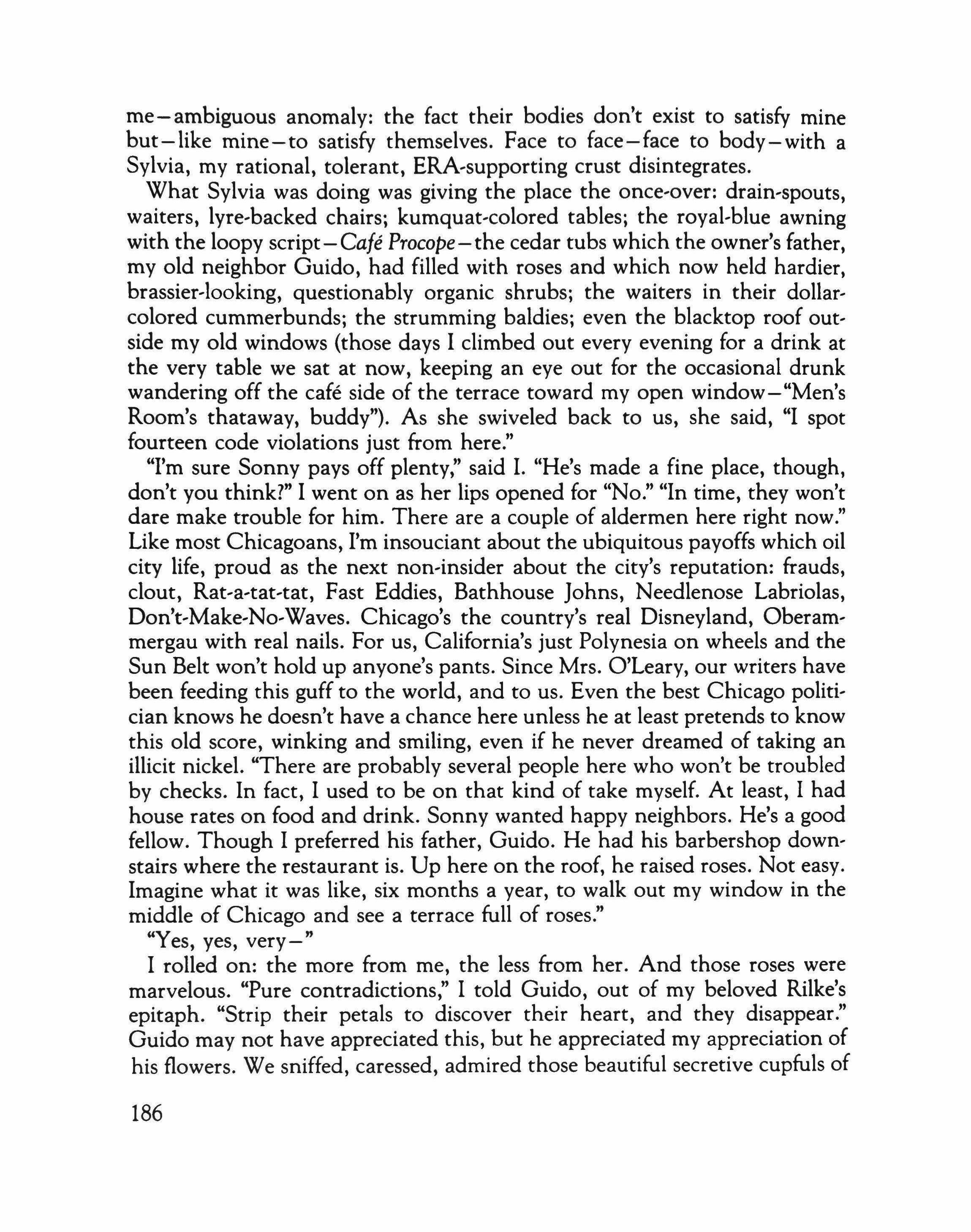
me - ambiguous anomaly: the fact their bodies don't exist to satisfy mine but-like mine-to satisfy themselves. Face to face-face to body-with a Sylvia, my rational, tolerant, ERA,supporting crust disintegrates.
What Sylvia was doing was giving the place the once-over: drain-spouts, waiters, lyre-backed chairs; kumquat-colored tables; the royal-blue awning with the loopy script-Cafe Procope-the cedar tubs which the owner's father, myoid neighbor Guido, had filled with roses and which now held hardier, brassier,looking, questionably organic shrubs; the waiters in their dollar, colored cummerbunds; the strumming baldies; even the blacktop roof out, side myoid windows (those days I climbed out every evening for a drink at the very table we sat at now, keeping an eye out for the occasional drunk wandering off the cafe side of the terrace toward my open window-"Men's Room's thataway, buddy"). As she swiveled back to us, she said, "I spot fourteen code violations just from here."
"I'm sure Sonny pays off plenty:' said 1. "He's made a fine place, though, don't you think?" I went on as her lips opened for "No." "In time, they won't dare make trouble for him. There are a couple of aldermen here right now." Like most Chicagoans, I'm insouciant about the ubiquitous payoffs which oil city life, proud as the next non-insider about the city's reputation: frauds, clout, Rat-a-tat-tat, Fast Eddies, Bathhouse Johns, Needlenose Labriolas, Don't-Make-No-Waves, Chicago's the country's real Disneyland, Oberammergau with real nails. For us, California's just Polynesia on wheels and the Sun Belt won't hold up anyone's pants. Since Mrs. O'Leary, our writers have been feeding this guff to the world, and to us. Even the best Chicago politician knows he doesn't have a chance here unless he at least pretends to know this old score, winking and smiling, even if he never dreamed of taking an illicit nickel. "There are probably several people here who won't be troubled by checks. In fact, I used to be on that kind of take myself. At least, I had house rates on food and drink. Sonny wanted happy neighbors. He's a good fellow. Though I preferred his father, Guido. He had his barbershop down, stairs where the restaurant is. Up here on the roof, he raised roses. Not easy. Imagine what it was like, six months a year, to walk out my window in the middle of Chicago and see a terrace full of roses."
"Yes, yes, very"
I rolled on: the more from me, the less from her. And those roses were marvelous. "Pure contradictions," I told Guido, out of my beloved Rilke's epitaph. "Strip their petals to discover their heart, and they disappear." Guido may not have appreciated this, but he appreciated my appreciation of his flowers. We sniffed, caressed, admired those beautiful secretive cupfuls of

gold and ivory, scarlet and pink. The day after Richard Nixon pulled his festered self out of the American hide, old Guido-a Nixon diehard-fell dead out here. I picked him out of his compost heap. (Winey pomace, fish scraps and God knows what, I can smell it now.)
"We may see Sonny tonight. I'll introduce you."
"Don't b-"
"Little dark guy, with eyebrows. Looks like a pasha. In his way, he's a scholar too. Named this place after the first coffeehouse in Paris. Run by a Sicilian named Procopio. He also told me that Michelet, the historian -"
"I know Michelet. You don't -"
- said coffee was behind the French Revolution. I suppose he meant it roused the wine-soaked brains of the lumieres. As good as any-"
"As bad as any. Totally moronic. I hope the man's reputation rests on something better than that." I couldn't keep it up. Sylvia would eventually break through. And I was worn out. I'm a listener, not a talker. My guide, the great Genealogist of Morals, thought women used weakness, invented weakness, to excuse themselves from life. Erfinderisch in Schwachen was his phrase. He didn't know women like Sylvia; his Cosima Wagner and Frau Lou were pussycats.
"I told you I was here to understand you, not revolutions, not cafes, not local hoodlums and fifth-rate Frenchmen. Not Chicago, about which I know sixty times more than you, Cy. I don't work shut up in a room. I'm in the courts, thirty hours a week, and cleaning legal latrines the rest ofthe time. So you can't bullshit me." She propped elbows on the table, rested her manly chin on raised palms and tried to. hook my eyes with hers. I was in the witness box. "I want to understand you. Cy, the editor. Cy, the poppa. Cy, the lover. Cy, the smart guy who holes up in his nowheres turning out a very fine News-Letter read by-what?-eleven hundred souls?"
"Thirty-eight hundred," said I. "Sylvia, don't waste analysis on me. There's not enough to understand. I wish there were."
"That's Point One, Cy. I don't think you do."
"I don't get that. Why shouldn't I?"
"That's what I want to know. My suspicion is when a man buries his talent, he's afraid of it. Or he's hiding from something outside."
"Maybe so, Sylvia. I'm not introspective. Still, I think I'm far more ordinary than you suspect. Maybe that's what I'm hiding. All right, maybe I'm an ordinary intellectual. But that's it."
"I don't believe in the ordinary. I spend my life quizzing supposedly ordinary people, jurors, witnesses, clients. Not one of them is ordinary. So how
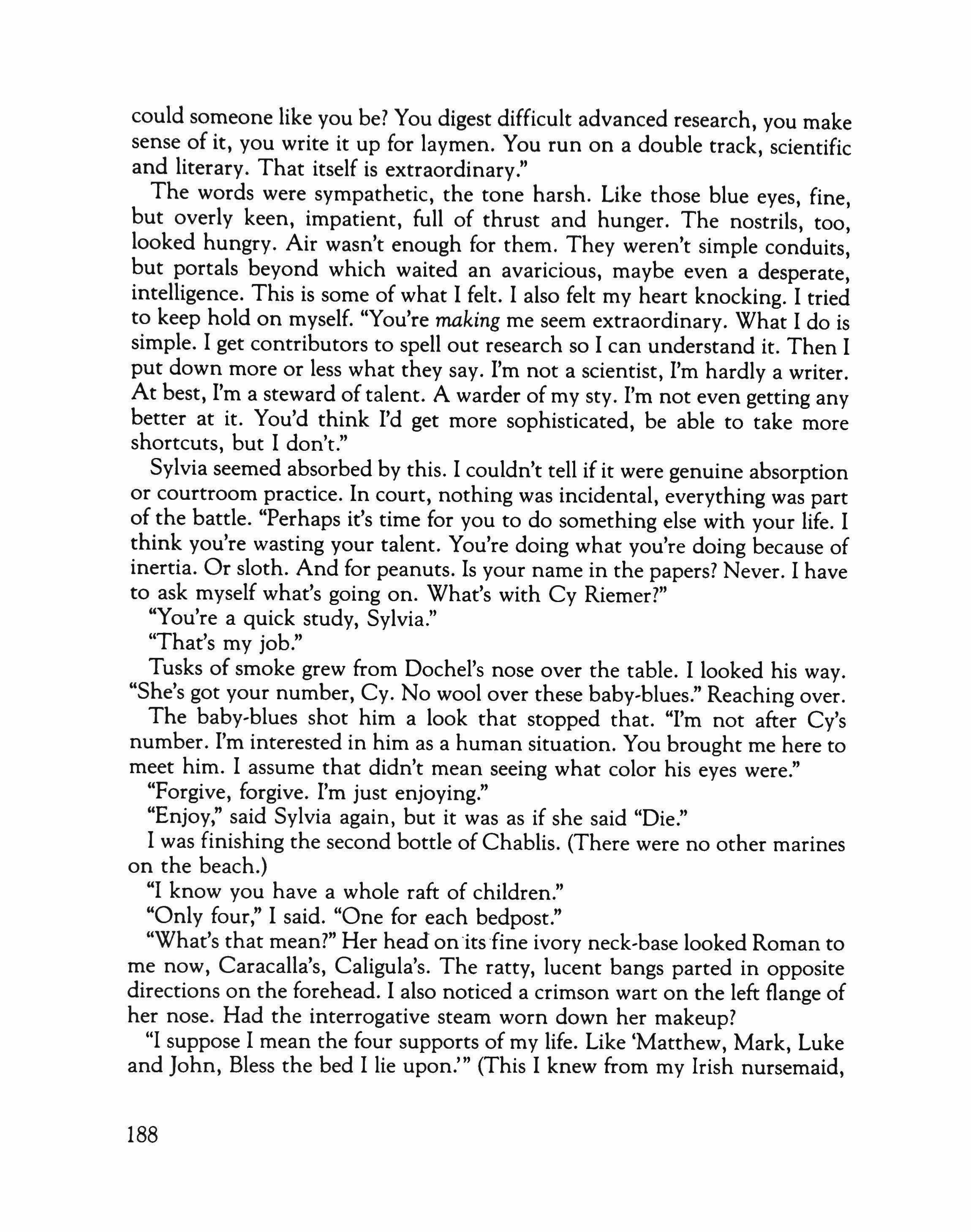
could someone like you be? You digest difficult advanced research, you make sense of it, you write it up for laymen. You run on a double track, scientific and literary. That itself is extraordinary."
The words were sympathetic, the tone harsh. Like those blue eyes, fine, but overly keen, impatient, full of thrust and hunger. The nostrils, too, looked hungry. Air wasn't enough for them. They weren't simple conduits, but portals beyond which waited an avaricious, maybe even a desperate, intelligence. This is some of what I felt. I also felt my heart knocking. I tried to keep hold on myself. "You're making me seem extraordinary. What I do is simple. I get contributors to spell out research so I can understand it. Then I put down more or less what they say. I'm not a scientist, I'm hardly a writer. At best, I'm a steward of talent. A warder of my sty. I'm not even getting any better at it. You'd think I'd get more sophisticated, be able to take more shortcuts, but I don't."
Sylvia seemed absorbed by this. I couldn't tell if it were genuine absorption or courtroom practice. In court, nothing was incidental, everything was part of the battle. "Perhaps it's time for you to do something else with your life. I think you're wasting your talent. You're doing what you're doing because of inertia. Or sloth. And for peanuts. Is your name in the papers? Never. I have to ask myself what's going on. What's with Cy Riemer?"
"You're a quick study, Sylvia."
"That's my job."
Tusks of smoke grew from Dochel's nose over the table. I looked his way. "She's got your number, Cy. No wool over these baby-blues," Reaching over.
The baby-blues shot him a look that stopped that. "I'm not after Cv's number. I'm interested in him as a human situation. You brought me here to meet him. I assume that didn't mean seeing what color his eyes were."
"Forgive, forgive. I'm just enjoying."
"Enjoy," said Sylvia again, but it was as if she said "Die."
I was finishing the second bottle of Chablis. (There were no other marines on the beach.)
"I know you have a whole raft of children."
"Only four," I said. "One for each bedpost."
"What's that mean?" Her head on 'its fine ivory neck-base looked Roman to me now, Caracalla's, Caligula's. The ratty, lucent bangs parted in opposite directions on the forehead. I also noticed a crimson wart on the left flange of her nose. Had the interrogative steam worn down her makeup?
"I suppose I mean the four supports of my life. Like 'Matthew, Mark, Luke and John, Bless the bed I lie upon.'" (This I knew from my Irish nursemaid,

Mary Quinn.) The sun said goodbye now, plunging behind the six flats. Little plugs of gold pinged against the glasses and ice buckets. One lit Sylvia's wart. "Does that make sense?"
"Everything makes sense. If you spend time making sense of it. Very inter, esting sense. 1 gather your children are more important to you than - I can't remember the name of your young companion."
"Emma," said Seldon.
"I wouldn't say that:' I said. "1 don't think of affection as a pie to be sliced."
"I'm sure you have more of it than most." Sylvia's tone suggested I had little or none. "Seldon tells me you're very good to her. You hold her hand, cook her supper, bind her wounds, do everything but wipe her ass. Or does that come with the package?"
Seldon added his ha ha to this jewel. But uneasily. Even he knew some' thing was happening to me. 1 ignored the last - what the Kennedy crowd called the Trollope ploy, taking your enemy's most generous offer as his negotiating position - and said, "I inflict more wounds than I bind. I wonder what I've told you, Seldon. I'm ashamed Sylvia has this view of me."
Dochel made it's-not-my-doing gestures.
Sylvia said, "Nothing to do with Seldon. I'm testing the perimeter. 1 could guess you'd have a Mutual Tyranny arrangement with a woman. To rein, force your retreat from life. These relationships are never one-way. The weak party offers weakness, the strong strength. Both equally useful."
So Sylvia was a Nietzschean. "You know lots about relationships, Sylvia."
"Not personally, no."
This got me a bit and softened what I said. "You're probably right, there's some soft mutual tyranny in most relationships. But Emma and I are more a Mutual Aid Society. You can call it love, if you need a name."
"That's the most useless word in the dictionary. You love Chablis, Seldon loves tennis. The question is, 'Are you doing each other any good or just sustaining each other's weakness? Are you being held back from something better?' Most relationships are just excuses for not getting to the depths. Love, as you call it, work, fatherhood. They can all be forms of sloth. Doing violence to your nature. What do you think, Seldon?"
She would have asked the table if Seldon hadn't been there. It was a cushion shot, that's all. The destination was me. Well, it couldn't last forever. In an hour, I'd be with Emma. She'd have saved up jokes from Johnny Carson to tell me, she'd hear my report on Seldon's latest debacle.
Seldon said, "Cv's basically an artist. A Bohemian. He likes all this." He waved at the rooftops, the candlelit tables-only ours dark-the light-popped
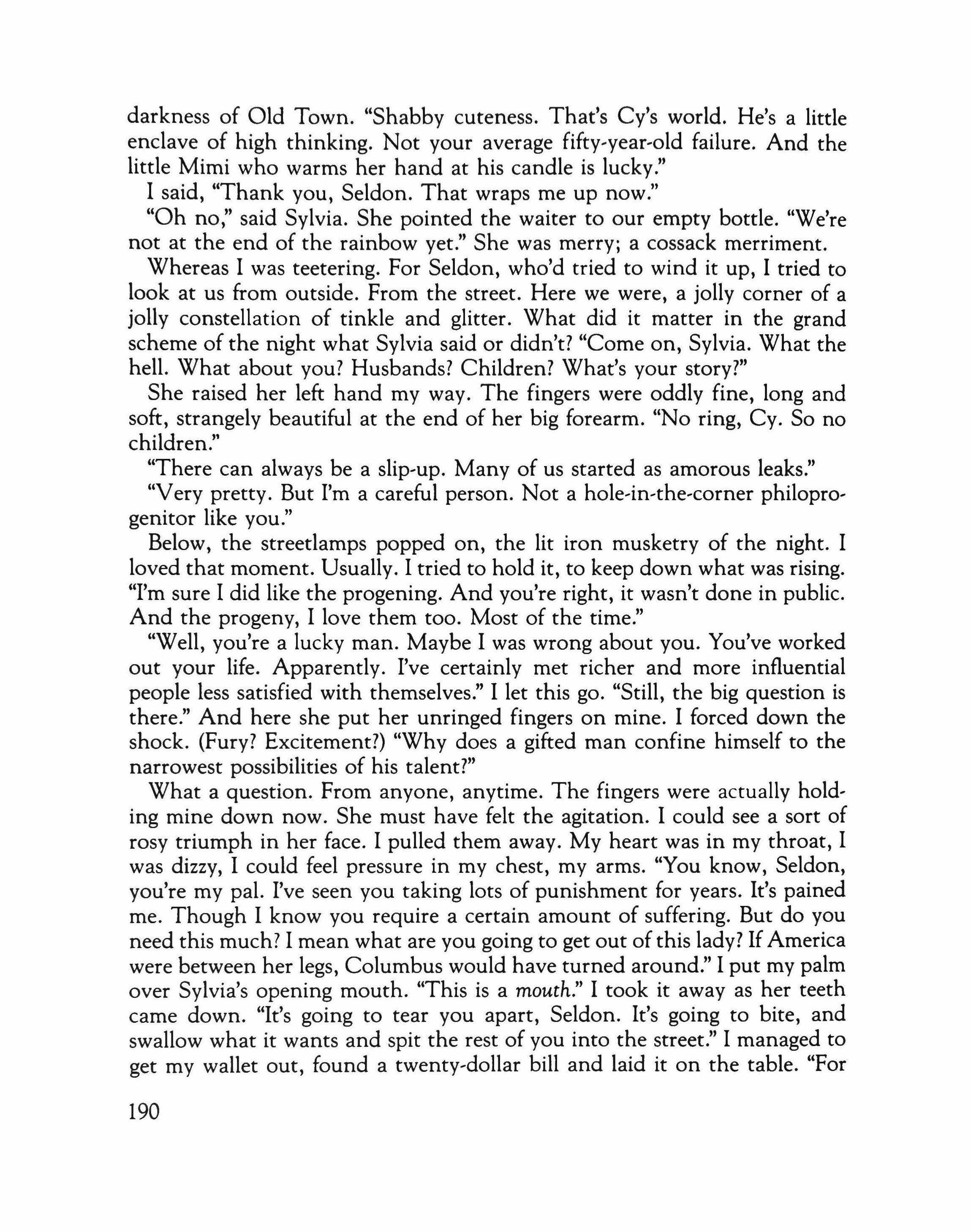
darkness of Old Town. "Shabby cuteness. That's Cv's world. He's a little enclave of high thinking. Not your average fifry-vear-old failure. And the little Mimi who warms her hand at his candle is lucky."
I said, "Thank you, Seldon. That wraps me up now."
"Oh no," said Sylvia. She pointed the waiter to our empty bottle. "We're not at the end of the rainbow yet." She was merry; a cossack merriment. Whereas I was teetering. For Seldon, who'd tried to wind it up, I tried to look at us from outside. From the street. Here we were, a jolly corner of a jolly constellation of tinkle and glitter. What did it matter in the grand scheme of the night what Sylvia said or didn't? "Come on, Sylvia. What the hell. What about you? Husbands? Children? What's your story?"
She raised her left hand my way. The fingers were oddly fine, long and soft, strangely beautiful at the end of her big forearm. "No ring, Cv. So no children."
"There can always be a slip-up, Many of us started as amorous leaks."
"Very pretty. But I'm a careful person. Not a hole-in-the-comer philoprogenitor like you."
Below, the streetlamps popped on, the lit iron musketry of the night. I loved that moment. Usually. I tried to hold it, to keep down what was rising. "I'm sure I did like the progening. And you're right, it wasn't done in public. And the progeny, I love them too. Most of the time."
"Well, you're a lucky man. Maybe I was wrong about you. You've worked out your life. Apparently. I've certainly met richer and more influential people less satisfied with themselves." I let this go. "Still, the big question is there." And here she put her unringed fingers on mine. I forced down the shock. (Fury? Excitement?) "Why does a gifted man confine himself to the narrowest possibilities of his talent?"
What a question. From anyone, anytime. The fingers were actually hold, ing mine down now. She must have felt the agitation. I could see a sort of rosy triumph in her face. I pulled them away. My heart was in my throat, I was dizzy, I could feel pressure in my chest, my arms. "You know, Seldon, you're my pal. I've seen you taking lots of punishment for years. It's pained me. Though I know you require a certain amount of suffering. But do you need this much? I mean what are you going to get out of this lady? If America were between her legs, Columbus would have turned around." I put my palm over Sylvia's opening mouth. "This is a mouth." I took it away as her teeth came down. "It's going to tear you apart, Seldon. It's going to bite, and swallow what it wants and spit the rest of you into the street." I managed to get my wallet out, found a twenty-dollar bill and laid it on the table. "For
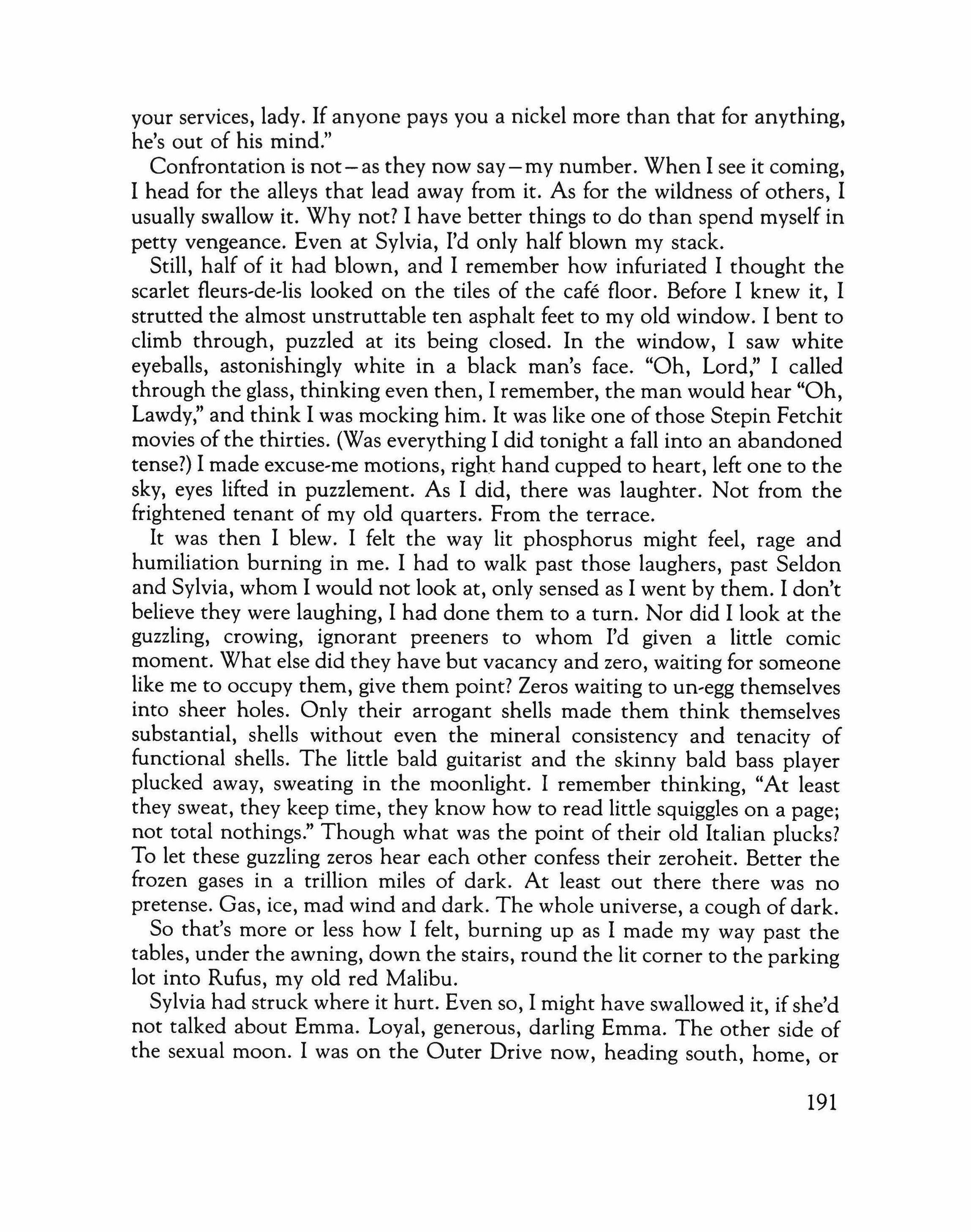
your services, lady. If anyone pays you a nickel more than that for anything, he's out of his mind."
Confrontation is not-as they now say-my number. When I see it coming, I head for the alleys that lead away from it. As for the wildness of others, I usually swallow it. Why not? I have better things to do than spend myself in petty vengeance. Even at Sylvia, I'd only half blown my stack.
Still, half of it had blown, and I remember how infuriated I thought the scarlet fleurs-de-lis looked on the tiles of the cafe floor. Before I knew it, I strutted the almost unstruttable ten asphalt feet to my old window. I bent to climb through, puzzled at its being closed. In the window, I saw white eyeballs, astonishingly white in a black man's face. "Oh, Lord," I called through the glass, thinking even then, I remember, the man would hear "Oh, Lawdy," and think I was mocking him. It was like one of those Stepin Fetchit movies of the thirties. (Was everything I did tonight a fall into an abandoned tense?) I made excuse-me motions, right hand cupped to heart, left one to the sky, eyes lifted in puzzlement. As I did, there was laughter. Not from the frightened tenant of my old quarters. From the terrace.
It was then I blew. I felt the way lit phosphorus might feel, rage and humiliation burning in me. I had to walk past those laughers, past Seldon and Sylvia, whom I would not look at, only sensed as I went by them. I don't believe they were laughing, I had done them to a turn. Nor did I look at the guzzling, crowing, ignorant preeners to whom I'd given a little comic moment. What else did they have but vacancy and zero, waiting for someone like me to occupy them, give them point? Zeros waiting to uri-egg themselves into sheer holes. Only their arrogant shells made them think themselves substantial, shells without even the mineral consistency and tenacity of functional shells. The little bald guitarist and the skinny bald bass player plucked away, sweating in the moonlight. I remember thinking, "At least they sweat, they keep time, they know how to read little squiggles on a page; not total nothings." Though what was the point of their old Italian plucks? To let these guzzling zeros hear each other confess their zeroheit. Better the frozen gases in a trillion miles of dark. At least out there there was no pretense. Gas, ice, mad wind and dark. The whole universe, a cough of dark.
So that's more or less how I felt, burning up as I made my way past the tables, under the awning, down the stairs, round the lit corner to the parking lot into Rufus, my old red Malibu.
Sylvia had struck where it hurt. Even so, I might have swallowed it, if she'd not talked about Emma. Loyal, generous, darling Emma. The other side of the sexual moon. I was on the Outer Drive now, heading south, home, or

not home, to Emma's. Out over the lake, out of the fumes of city light blurring the sharpness of the stars. That's what I should concentrate on. And the glistening, bronze cylinder of Lake Point Tower. And the bridge over the light-encrusted shaft of the river banked with mystic glass and steel, the murderous Svcurve, and then straight south toward the imperial, deceptivetwo-dimensional till you were within yards of them-columns of the Field Museum.
Emma was asleep under the silvery slogan she'd looped on the red walls {painted over the cream base into the shape of a great-valved heart or grand, tiny-cracked buttocks}: KONG LOVES FAY. Her nightgown twisted about her waist, her mouth was giving out some sleepish Esperanto. I lay naked beside her, home, and happy there in the familiar sleep-heat, the familiar fragrance-lavender and minty. My body touched the twin interrogations and gave them the male salute. There was a squirm of welcome from the faraway dream country. I slid off, the lieutenant still saluting, though now, in its classically confused loyalty, it was saluting another body as well, the powerful, Seldon-occupied, Sieglinde Fortress that was Sylvia.
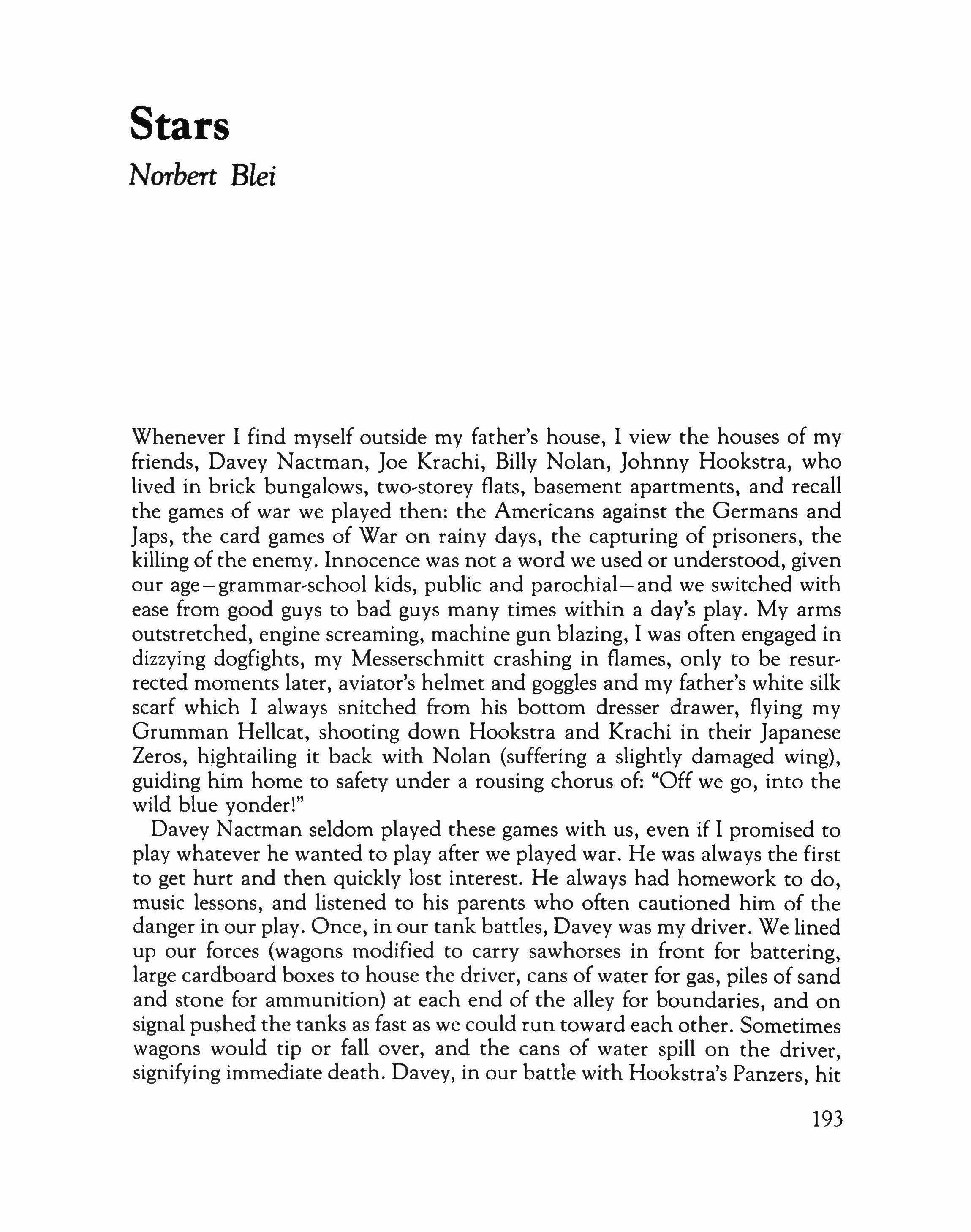
Whenever I find myself outside my father's house, I view the houses of my friends, Davey Nactman, Joe Krachi, Billy Nolan, Johnny Hookstra, who lived in brick bungalows, two-storey flats, basement apartments, and recall the games of war we played then: the Americans against the Germans and Japs, the card games of War on rainy days, the capturing of prisoners, the killing of the enemy. Innocence was not a word we used or understood, given our age= grammar-school kids, public and parochial-and we switched with ease from good guys to bad guys many times within a day's play. My arms outstretched, engine screaming, machine gun blazing, I was often engaged in dizzying dogfights, my Messerschmitt crashing in flames, only to be resurrected moments later, aviator's helmet and goggles and my father's white silk scarf which I always snitched from his bottom dresser drawer, flying my Grumman Hellcat, shooting down Hookstra and Krachi in their Japanese Zeros, hightailing it back with Nolan (suffering a slightly damaged wing), guiding him horne to safety under a rousing chorus of: "Off we go, into the wild blue yonder!"
Davey Nactman seldom played these games with us, even if I promised to play whatever he wanted to play after we played war. He was always the first to get hurt and then quickly lost interest. He always had homework to do, music lessons, and listened to his parents who often cautioned him of the danger in our play. Once, in our tank battles, Davey was my driver. We lined up our forces (wagons modified to carry sawhorses in front for battering, large cardboard boxes to house the driver, cans of water for gas, piles of sand and stone for ammunition) at each end of the alley for boundaries, and on signal pushed the tanks as fast as we could run toward each other. Sometimes wagons would tip or fall over, and the cans of water spill on the driver, signifying immediate death. Davey, in our battle with Hookstra's Panzers, hit
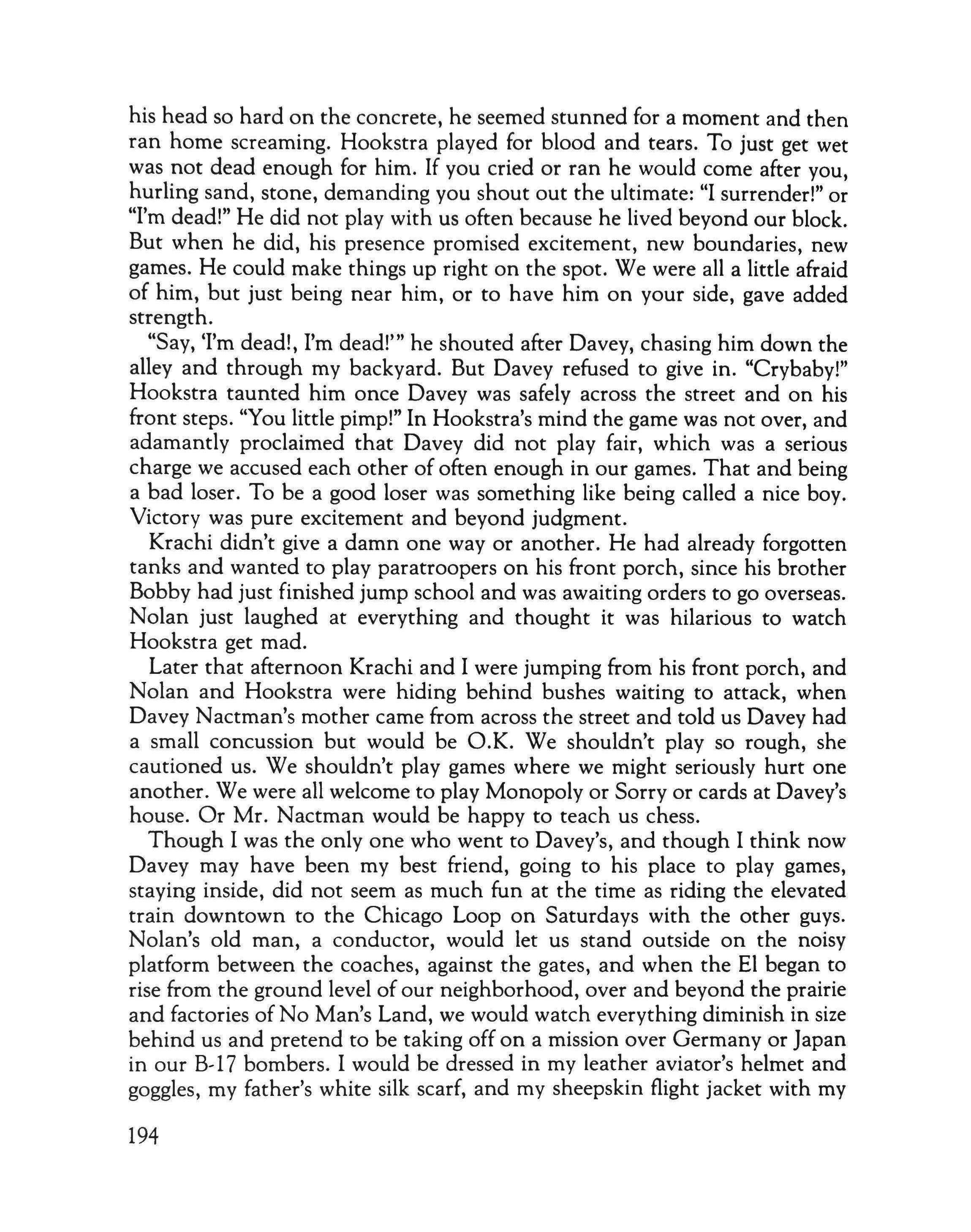
his head so hard on the concrete, he seemed stunned for a moment and then ran home screaming. Hookstra played for blood and tears. To just get wet was not dead enough for him. If you cried or ran he would come after you, hurling sand, stone, demanding you shout out the ultimate: "I surrender!" or "I'm dead!" He did not play with us often because he lived beyond our block. But when he did, his presence promised excitement, new boundaries, new games. He could make things up right on the spot. We were all a little afraid of him, but just being near him, or to have him on your side, gave added strength.
"Say, 'I'm dead!, I'm deadl'" he shouted after Davey, chasing him down the alley and through my backyard. But Davey refused to give in. "Crybaby!" Hookstra taunted him once Davey was safely across the street and on his front steps. "You little pimp!" In Hookstra's mind the game was not over, and adamantly proclaimed that Davey did not play fair, which was a serious charge we accused each other of often enough in our games. That and being a bad loser. To be a good loser was something like being called a nice boy. Victory was pure excitement and beyond judgment.
Krachi didn't give a damn one way or another. He had already forgotten tanks and wanted to play paratroopers on his front porch, since his brother Bobby had just finished jump school and was awaiting orders to go overseas. Nolan just laughed at everything and thought it was hilarious to watch Hookstra get mad.
Later that afternoon Krachi and I were jumping from his front porch, and Nolan and Hookstra were hiding behind bushes waiting to attack, when Davey Nacrman's mother came from across the street and told us Davey had a small concussion but would be O.K. We shouldn't play so rough, she cautioned us. We shouldn't play games where we might seriously hurt one another. We were all welcome to play Monopoly or Sorry or cards at Davey's house. Or Mr. Nactman would be happy to teach us chess.
Though I was the only one who went to Davey's, and though I think now Davey may have been my best friend, going to his place to play games, staying inside, did not seem as much fun at the time as riding the elevated train downtown to the Chicago Loop on Saturdays with the other guys. Nolan's old man, a conductor, would let us stand outside on the noisy platform between the coaches, against the gates, and when the EI began to rise from the ground level of our neighborhood, over and beyond the prairie and factories of No Man's Land, we would watch everything diminish in size behind us and pretend to be taking off on a mission over Germany or Japan in our B-17 bombers. I would be dressed in my leather aviator's helmet and goggles, my father's white silk scarf, and my sheepskin flight jacket with my

army air corps shoulder patch of gold wings on a field of blue with a white star and red center that my mother had sewn on. And together, Nolan, Krachi, Hookstra and I, would prepare to drop bombs over Germany, look, ing down and back upon our world, seeing it differently, subject to our command. I held sharply pointed bullet heads that my mother brought home from the war factory where she worked in No Man's Land. And I hollered, "Bombs away!" when the train reached its highest altitude over Douglas Park, while Nolan, Krachi, and Hookstra made explosive sounds, as they peered down into the flame and smoke and destruction yelling, "Bull's-eve! Bull'seye!" We would never get offthe EI downtown, but continually ride the Loop back and forth, stay on the same train with Nolan's old man for hours, finally getting off with him at our station when he was through working, or when we had tired of the game and wanted to play something else or see a movie.
There were solitary games as well, less combative, never shared with friends. Games of an only child whose parents both worked and left him with much time to himself. Home alone, afraid of the dark, I would turn on every light in the house and play priest, fashioning a chasuble of two dish towels pinned over my front and back, setting the kitchen table as my altar with a bread-box tabernacle and a Pilsner glass as a chalice, genuflecting, mumbling my altar-boy Latin, offering body and blood to a small crucifix of palms my mother had tacked to the wall above the table. I wished for candles, but there were none. If I could have explained this all to Davey, in my manhood, if I could have understood it myself then, he might have known my aspirations were holy: service to the Word, as we were taught in school, but which was as much a mystery to us then as a God divided in three parts, Father, Son, and Holy Ghost.
On rainy days, I would go up to the attic alone and play with a toy village that somehow came into our family from some relation in Europe. I would find the box my father had stored with the Christmas decorations, untie it, and carefully unwrap each handmade piece. Tiny wooden houses and shops, trees, fences, lampposts, horse-pulled wagons, a train with a gate and railroad-crossing sign, people and farm animals. At Christmas, I would set the village under the tree along with the crib-the stable, the wise men, the star of Bethlehem - all within the circle of my electric freight train, and at night, under only colored lights and engine headlamp, gaze at a place so peaceful I wanted to live there.
A grown man, I wander everywhere these days in search of the village, the small town, the neighborhood, imagining life on the scale I lived as a child. My father, who waits for my return, who cannot sleep nights since the new,


sodium streetlamps were installed in streets and alleys as a measure of crime prevention, so that nowhere is even the inside of the house dark enough for him anymore, my father sits in the vague darkness of the kitchen and says I'm like a wandering Jew.
Davey Nactman got along well by himself. I was the one always standing on the sidewalk outside his place, calling him to come out and play. I was the one wanting to include him in our war games. I was the one, alone, imagining rituals, inhabiting tiny villages, making puppets to talk to, the one who inevitably found the interior of the house-basement, main floor, attic-too dark, too empty, and, in such a state of mind, felt only Davey understood the conditions and private rewards of solitary play.
"David hasn't finished his homework," said Mrs. Nactman, "But please come inside and wait. His father will be home soon. He can teach you some chess."
We all lived close to one another except for Hookstra, who lived a few blocks north of us near the Dutch church and school he attended. Krachi lived next to me. Our backyards were separated by a brick fence his father, a mason, built from various common and face bricks he had accumulated from the jobs he worked. Their backyard was filled with hills of sand and gravel, wheelbarrows, mortar tubs, stacks of new and old lumber, scaffolds, platforms, sawhorses and cement mixers. There was not one blade of grass or a single tree. The entire yard was paved, little by little, with concrete left over from jobs. It was one of our favorite playgrounds. There were materials enough to make war or build houses, cities, bridges, ships and planes. One day we converted a huge sandpile into an amusement park-roller coasters, water rides, a tunnel of love, and a parachute jump, all modeled after Riverview Park on the North Side of Chicago, a place some of us had only visited once.
Nolan lived with his father and two older sisters in a basement apartment across the street, a few doors away from Davey. There was another sister, a nun, who was a missionary somewhere in Africa. His mother was dead, and the two sisters took care of him and Mr. Nolan, who was a bald-headed, kind man who loved to laugh, spoke with a brogue, and always saw to it that "his boys" rode the EI downtown with him, free, on Saturdays.
Krachi, Nolan, and I belonged to the same parish and went to the Infant of Prague grammar school. Hookstra attended the Dutch Christian school. And Davey went to the public school, which we all rather looked down upon. There were many arguments about which school was harder, public or parochial, and it was generally understood, especially among the Catholic
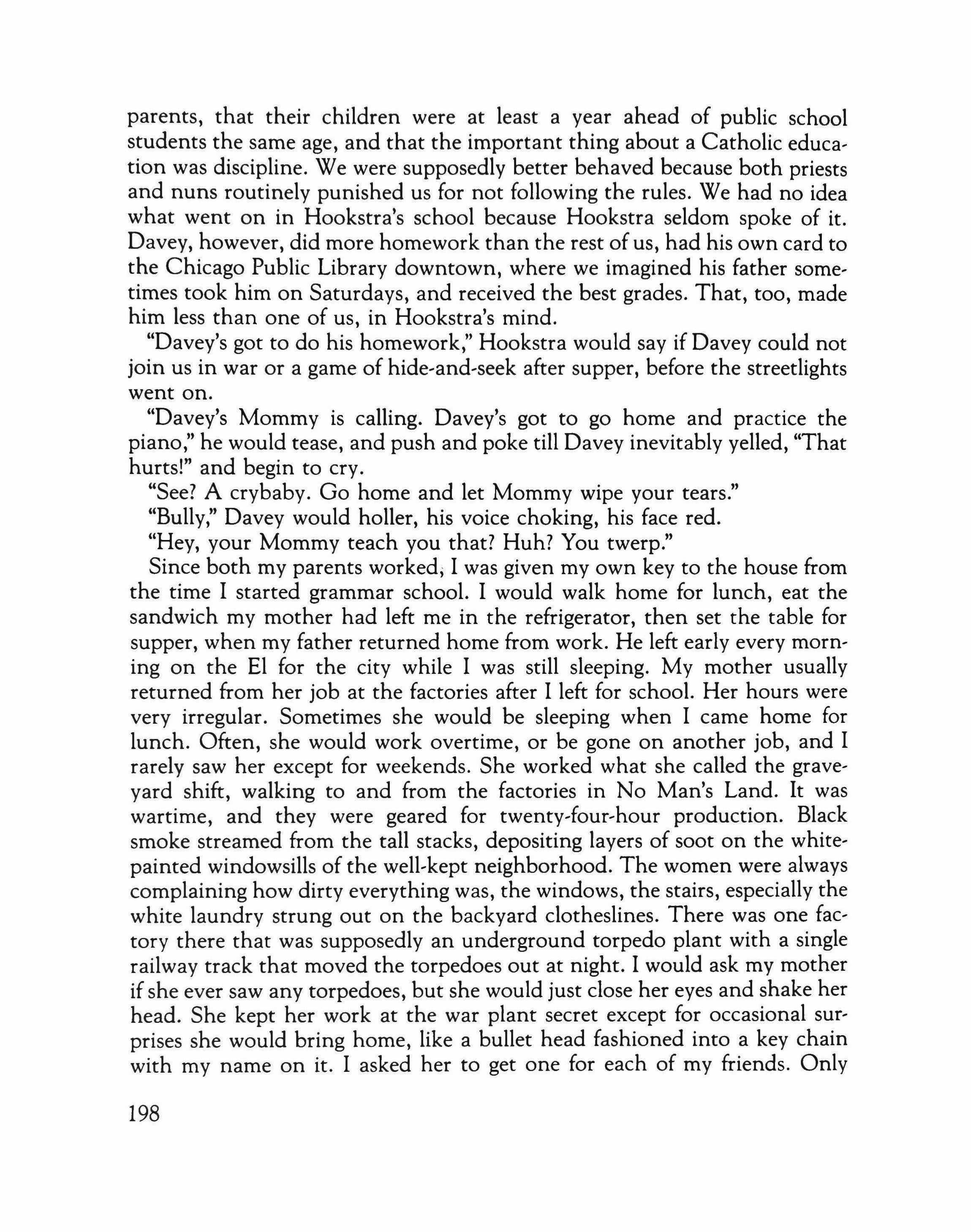
parents, that their children were at least a year ahead of public school students the same age, and that the important thing about a Catholic education was discipline. We were supposedly better behaved because both priests and nuns routinely punished us for not following the rules. We had no idea what went on in Hookstra's school because Hookstra seldom spoke of it. Davey, however, did more homework than the rest of us, had his own card to the Chicago Public Library downtown, where we imagined his father sometimes took him on Saturdays, and received the best grades. That, too, made him less than one of us, in Hookstra's mind.
"Davey's got to do his homework," Hookstra would say if Davey could not join us in war or a game of hide-and-seek after supper, before the streetlights went on.
"Davey's Mommy is calling. Davey's got to go home and practice the piano," he would tease, and push and poke till Davey inevitably yelled, "That hurts!" and begin to cry.
"See? A crybaby. Go home and let Mommy wipe your tears."
"Bully," Davey would holler, his voice choking, his face red.
"Hey, your Mommy teach you that? Huh? You twerp."
Since both my parents worked, I was given my own key to the house from the time I started grammar school. I would walk home for lunch, eat the sandwich my mother had left me in the refrigerator, then set the table for supper, when my father returned home from work. He left early every morning on the EI for the city while I was still sleeping. My mother usually returned from her job at the factories after I left for school. Her hours were very irregular. Sometimes she would be sleeping when I came home for lunch. Often, she would work overtime, or be gone on another job, and I rarely saw her except for weekends. She worked what she called the graveyard shift, walking to and from the factories in No Man's Land. It was wartime, and they were geared for twenty-four-hour production. Black smoke streamed from the tall stacks, depositing layers of soot on the whitepainted windowsills of the well-kept neighborhood. The women were always complaining how dirty everything was, the windows, the stairs, especially the white laundry strung out on the backyard clotheslines. There was one factory there that was supposedly an underground torpedo plant with a single railway track that moved the torpedoes out at night. I would ask my mother if she ever saw any torpedoes, but she would just close her eyes and shake her head. She kept her work at the war plant secret except for occasional surprises she would bring home, like a bullet head fashioned into a key chain with my name on it. I asked her to get one for each of my friends. Only
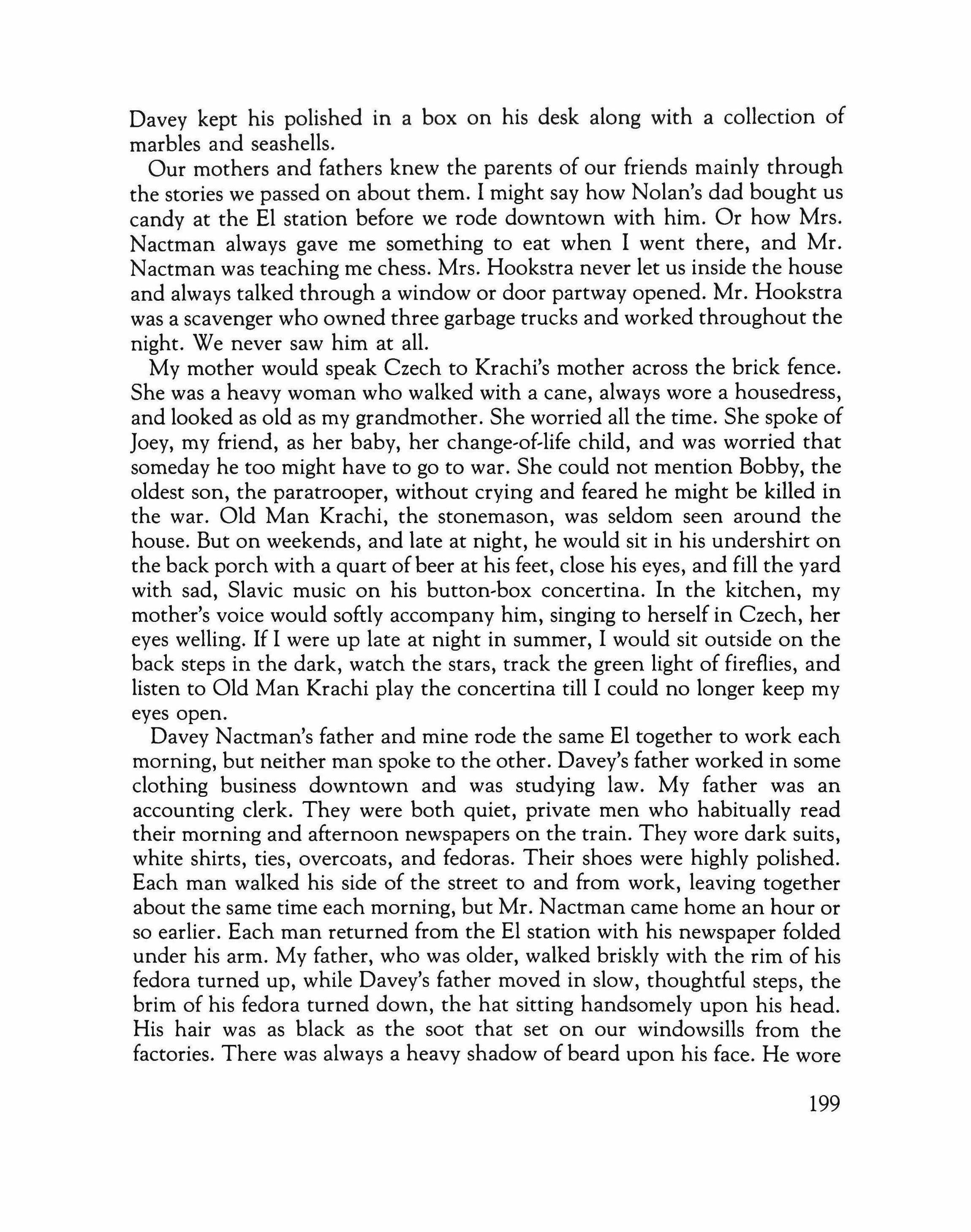
Davey kept his polished in a box on his desk along with a collection of marbles and seashells.
Our mothers and fathers knew the parents of our friends mainly through the stories we passed on about them. I might say how Nolan's dad bought us candy at the EI station before we rode downtown with him. Or how Mrs. Nactman always gave me something to eat when I went there, and Mr. Nactman was teaching me chess. Mrs. Hookstra never let us inside the house and always talked through a window or door partway opened. Mr. Hookstra was a scavenger who owned three garbage trucks and worked throughout the night. We never saw him at all.
My mother would speak Czech to Krachi's mother across the brick fence. She was a heavy woman who walked with a cane, always wore a housedress, and looked as old as my grandmother. She worried all the time. She spoke of Joey, my friend, as her baby, her change-of-life child, and was worried that someday he too might have to go to war. She could not mention Bobby, the oldest son, the paratrooper, without crying and feared he might be killed in the war. Old Man Krachi, the stonemason, was seldom seen around the house. But on weekends, and late at night, he would sit in his undershirt on the back porch with a quart ofbeer at his feet, close his eyes, and fill the yard with sad, Slavic music on his button-box concertina. In the kitchen, my mother's voice would softly accompany him, singing to herself in Czech, her eyes welling. If I were up late at night in summer, I would sit outside on the back steps in the dark, watch the stars, track the green light of fireflies, and listen to Old Man Krachi play the concertina till I could no longer keep my eyes open.
Davey Nactman's father and mine rode the same EI together to work each morning, but neither man spoke to the other. Davey's father worked in some clothing business downtown and was studying law. My father was an accounting clerk. They were both quiet, private men who habitually read their morning and afternoon newspapers on the train. They wore dark suits, white shirts, ties, overcoats, and fedoras. Their shoes were highly polished. Each man walked his side of the street to and from work, leaving together about the same time each morning, but Mr. Nactman came home an hour or so earlier. Each man returned from the EI station with his newspaper folded under his arm. My father, who was older, walked briskly with the rim of his fedora turned up, while Davey's father moved in slow, thoughtful steps, the brim of his fedora turned down, the hat sitting handsomely upon his head. His hair was as black as the soot that set on our windowsills from the factories. There was always a heavy shadow of beard upon his face. He wore
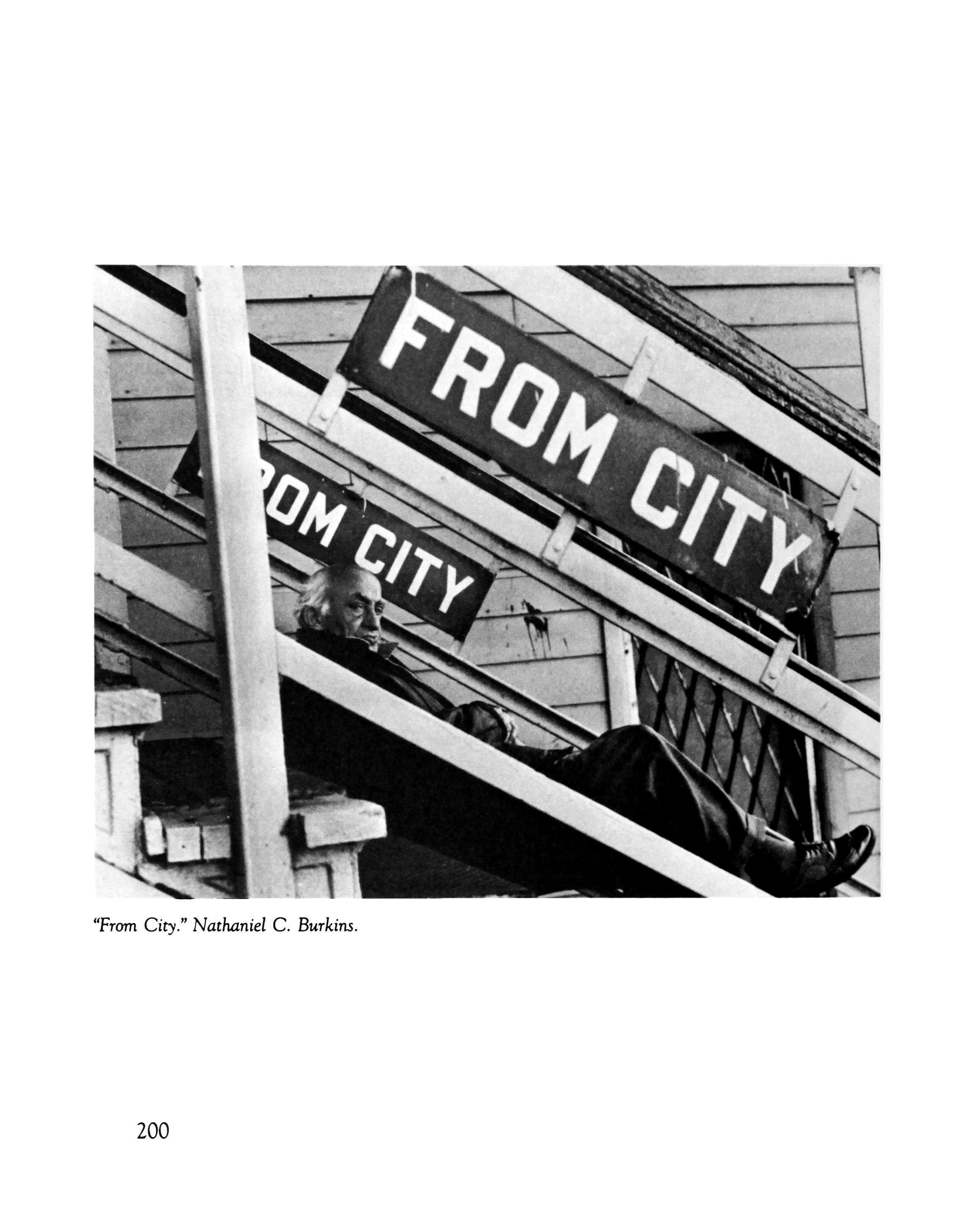
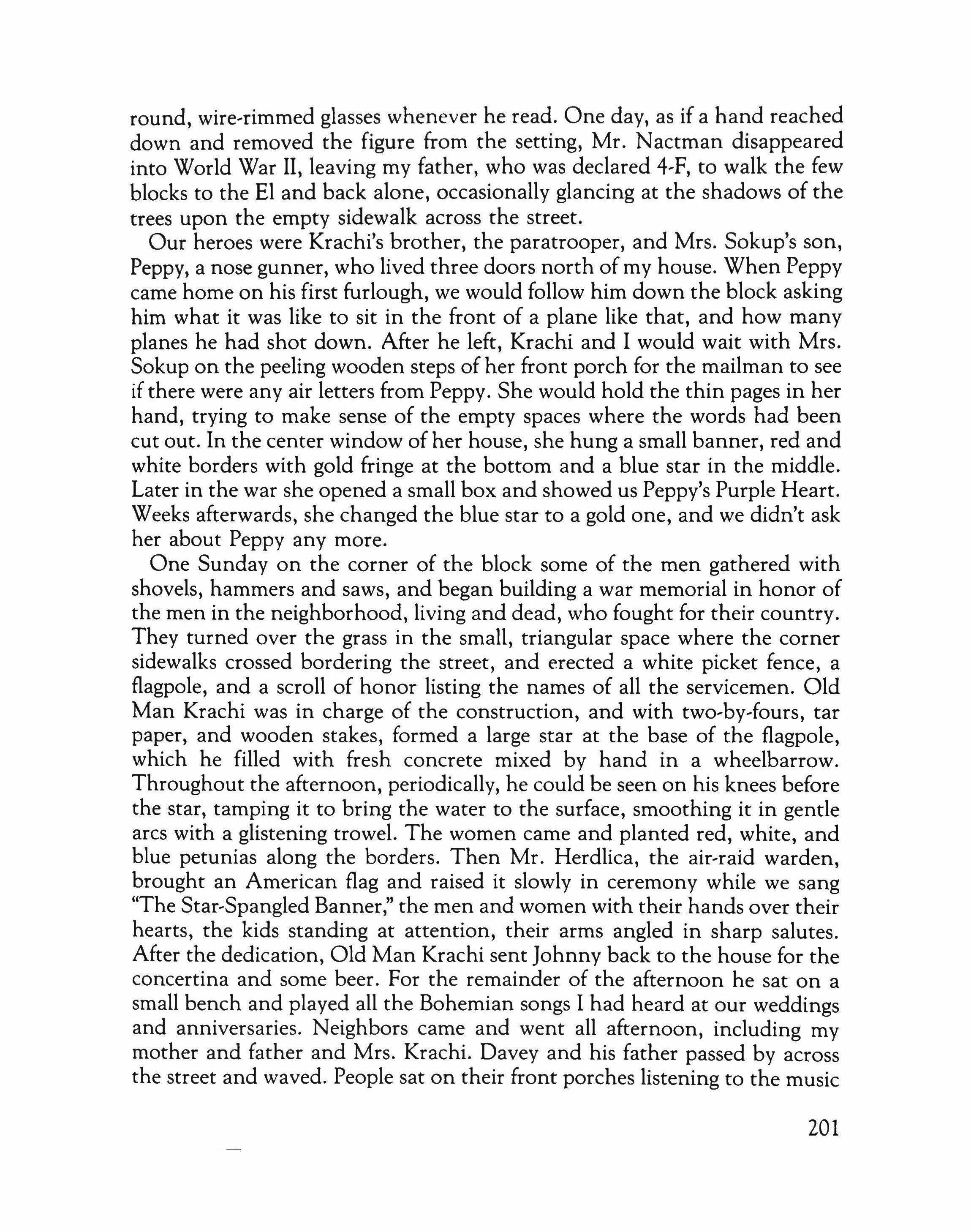
round, wire-rimmed glasses whenever he read. One day, as if a hand reached down and removed the figure from the setting, Mr. Nactman disappeared into World War II, leaving my father, who was declared 4,F, to walk the few blocks to the EI and back alone, occasionally glancing at the shadows of the trees upon the empty sidewalk across the street.
Our heroes were Krachi's brother, the paratrooper, and Mrs. Sokup's son, Peppy, a nose gunner, who lived three doors north of my house. When Peppy came home on his first furlough, we would follow him down the block asking him what it was like to sit in the front of a plane like that, and how many planes he had shot down. After he left, Krachi and I would wait with Mrs. Sokup on the peeling wooden steps of her front porch for the mailman to see if there were any air letters from Peppy. She would hold the thin pages in her hand, trying to make sense of the empty spaces where the words had been cut out. In the center window of her house, she hung a small banner, red and white borders with gold fringe at the bottom and a blue star in the middle. Later in the war she opened a small box and showed us Peppy's Purple Heart. Weeks afterwards, she changed the blue star to a gold one, and we didn't ask her about Peppy any more.
One Sunday on the corner of the block some of the men gathered with shovels, hammers and saws, and began building a war memorial in honor of the men in the neighborhood, living and dead, who fought for their country. They turned over the grass in the small, triangular space where the corner sidewalks crossed bordering the street, and erected a white picket fence, a flagpole, and a scroll of honor listing the names of all the servicemen. Old Man Krachi was in charge of the construction, and with two-by-fours, tar paper, and wooden stakes, formed a large star at the base of the flagpole, which he filled with fresh concrete mixed by hand in a wheelbarrow. Throughout the afternoon, periodically, he could be seen on his knees before the star, tamping it to bring the water to the surface, smoothing it in gentle arcs with a glistening trowel. The women came and planted red, white, and blue petunias along the borders. Then Mr. Herdlica, the air-raid warden, brought an American flag and raised it slowly in ceremony while we sang "The Star-Spangled Banner," the men and women with their hands over their hearts, the kids standing at attention, their arms angled in sharp salutes. After the dedication, Old Man Krachi sent Johnny back to the house for the concertina and some beer. For the remainder of the afternoon he sat on a small bench and played all the Bohemian songs I had heard at our weddings and anniversaries. Neighbors came and went all afternoon, including my mother and father and Mrs. Krachi. Davey and his father passed by across the street and waved. People sat on their front porches listening to the music
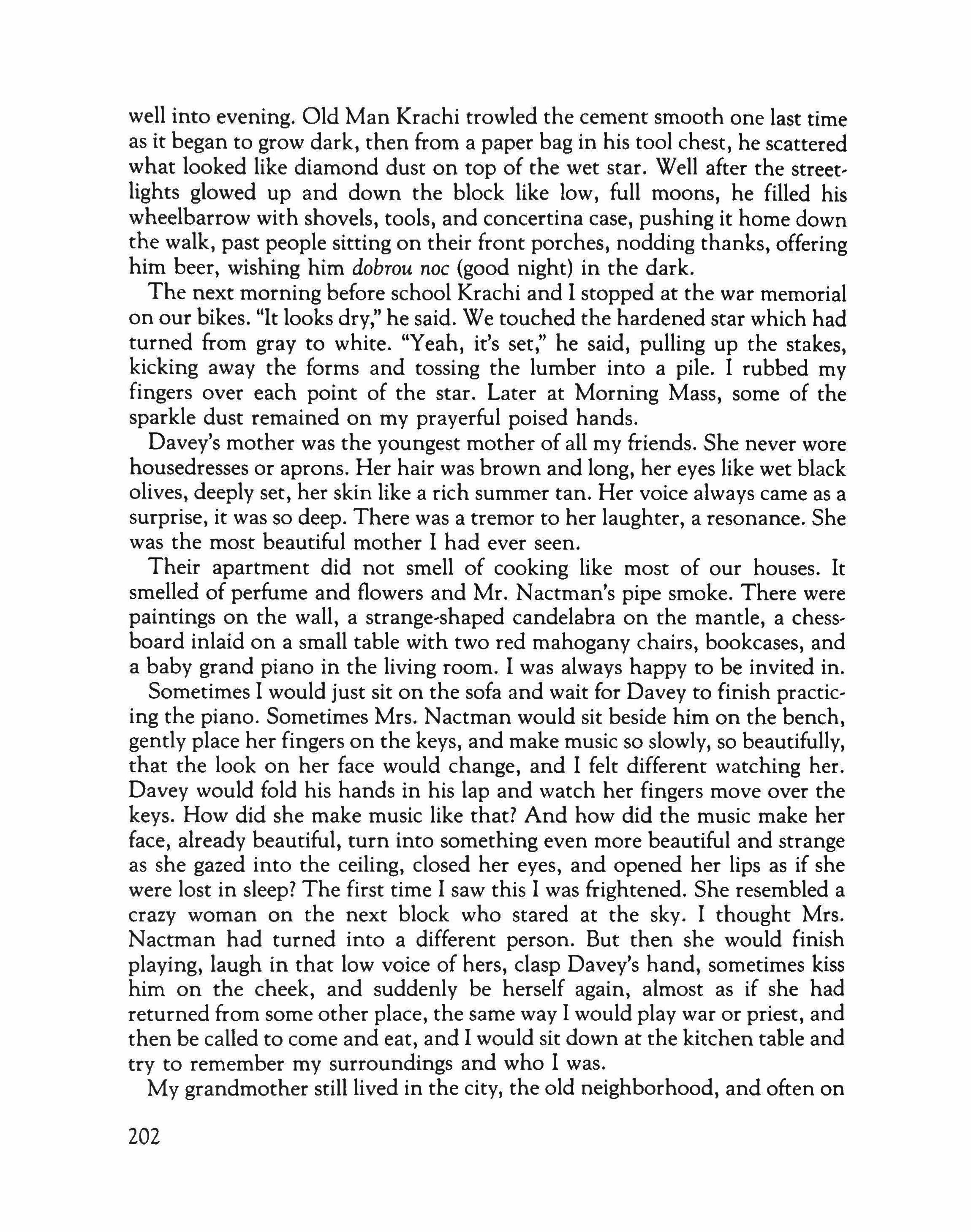
well into evening. Old Man Krachi trowled the cement smooth one last time as it began to grow dark, then from a paper bag in his tool chest, he scattered what looked like diamond dust on top of the wet star. Well after the streetlights glowed up and down the block like low, full moons, he filled his wheelbarrow with shovels, tools, and concertina case, pushing it home down the walk, past people sitting on their front porches, nodding thanks, offering him beer, wishing him dobrou noc (good night) in the dark.
The next morning before school Krachi and I stopped at the war memorial on our bikes. "It looks dry," he said. We touched the hardened star which had turned from gray to white. "Yeah, it's set," he said, pulling up the stakes, kicking away the forms and tossing the lumber into a pile. I rubbed my fingers over each point of the star. Later at Morning Mass, some of the sparkle dust remained on my prayerful poised hands.
Davey's mother was the youngest mother of all my friends. She never wore housedresses or aprons. Her hair was brown and long, her eyes like wet black olives, deeply set, her skin like a rich summer tan. Her voice always came as a surprise, it was so deep. There was a tremor to her laughter, a resonance. She was the most beautiful mother I had ever seen.
Their apartment did not smell of cooking like most of our houses. It smelled of perfume and flowers and Mr. Nactman's pipe smoke. There were paintings on the wall, a strange-shaped candelabra on the mantle, a chessboard inlaid on a small table with two red mahogany chairs, bookcases, and a baby grand piano in the living room. I was always happy to be invited in. Sometimes I would just sit on the sofa and wait for Davey to finish practicing the piano. Sometimes Mrs. Nactman would sit beside him on the bench, gently place her fingers on the keys, and make music so slowly, so beautifully, that the look on her face would change, and I felt different watching her. Davey would fold his hands in his lap and watch her fingers move over the keys. How did she make music like that? And how did the music make her face, already beautiful, turn into something even more beautiful and strange as she gazed into the ceiling, closed her eyes, and opened her lips as if she were lost in sleep? The first time I saw this I was frightened. She resembled a crazy woman on the next block who stared at the sky. I thought Mrs. Nactman had turned into a different person. But then she would finish playing, laugh in that low voice of hers, clasp Davey's hand, sometimes kiss him on the cheek, and suddenly be herself again, almost as if she had returned from some other place, the same way I would play war or priest, and then be called to come and eat, and I would sit down at the kitchen table and try to remember my surroundings and who I was.
My grandmother still lived in the city, the old neighborhood, and often on
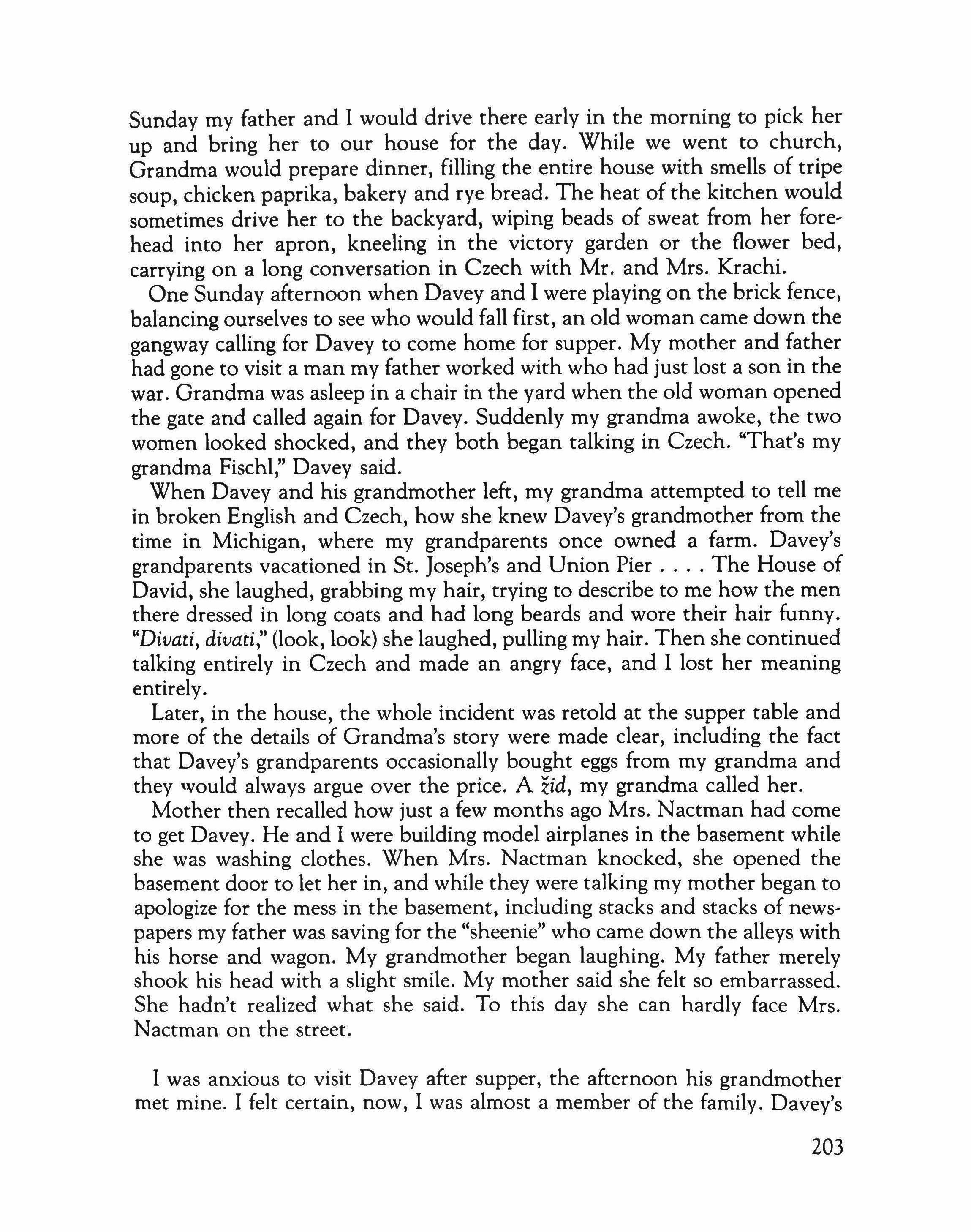
Sunday my father and I would drive there early in the morning to pick her up and bring her to our house for the day. While we went to church, Grandma would prepare dinner, filling the entire house with smells of tripe soup, chicken paprika, bakery and rye bread. The heat of the kitchen would sometimes drive her to the backyard, wiping beads of sweat from her fore' head into her apron, kneeling in the victory garden or the flower bed, carrying on a long conversation in Czech with Mr. and Mrs. Krachi.
One Sunday afternoon when Davey and I were playing on the brick fence, balancing ourselves to see who would fall first, an old woman came down the gangway calling for Davey to come home for supper. My mother and father had gone to visit a man my father worked with who had just lost a son in the war. Grandma was asleep in a chair in the yard when the old woman opened the gate and called again for Davey. Suddenly my grandma awoke, the two women looked shocked, and they both began talking in Czech. "That's my grandma Fischl," Davey said.
When Davey and his grandmother left, my grandma attempted to tell me in broken English and Czech, how she knew Davey's grandmother from the time in Michigan, where my grandparents once owned a farm. Davey's grandparents vacationed in St. Joseph's and Union Pier The House of David, she laughed, grabbing my hair, trying to describe to me how the men there dressed in long coats and had long beards and wore their hair funny. "Dioau, divati," (look, look) she laughed, pulling my hair. Then she continued talking entirely in Czech and made an angry face, and I lost her meaning entirely.
Later, in the house, the whole incident was retold at the supper table and more of the details of Grandma's story were made clear, including the fact that Davey's grandparents occasionally bought eggs from my grandma and they would always argue over the price. A zid, my grandma called her.
Mother then recalled how just a few months ago Mrs. Nactman had come to get Davey. He and I were building model airplanes in the basement while she was washing clothes. When Mrs. Nactman knocked, she opened the basement door to let her in, and while they were talking my mother began to apologize for the mess in the basement, including stacks and stacks of news, papers my father was saving for the "sheenie" who came down the alleys with his horse and wagon. My grandmother began laughing. My father merely shook his head with a slight smile. My mother said she felt so embarrassed. She hadn't realized what she said. To this day she can hardly face Mrs. Nactman on the street.
I was anxious to visit Davey after supper, the afternoon his grandmother met mine. I felt certain, now, I was almost a member of the family. Davey's
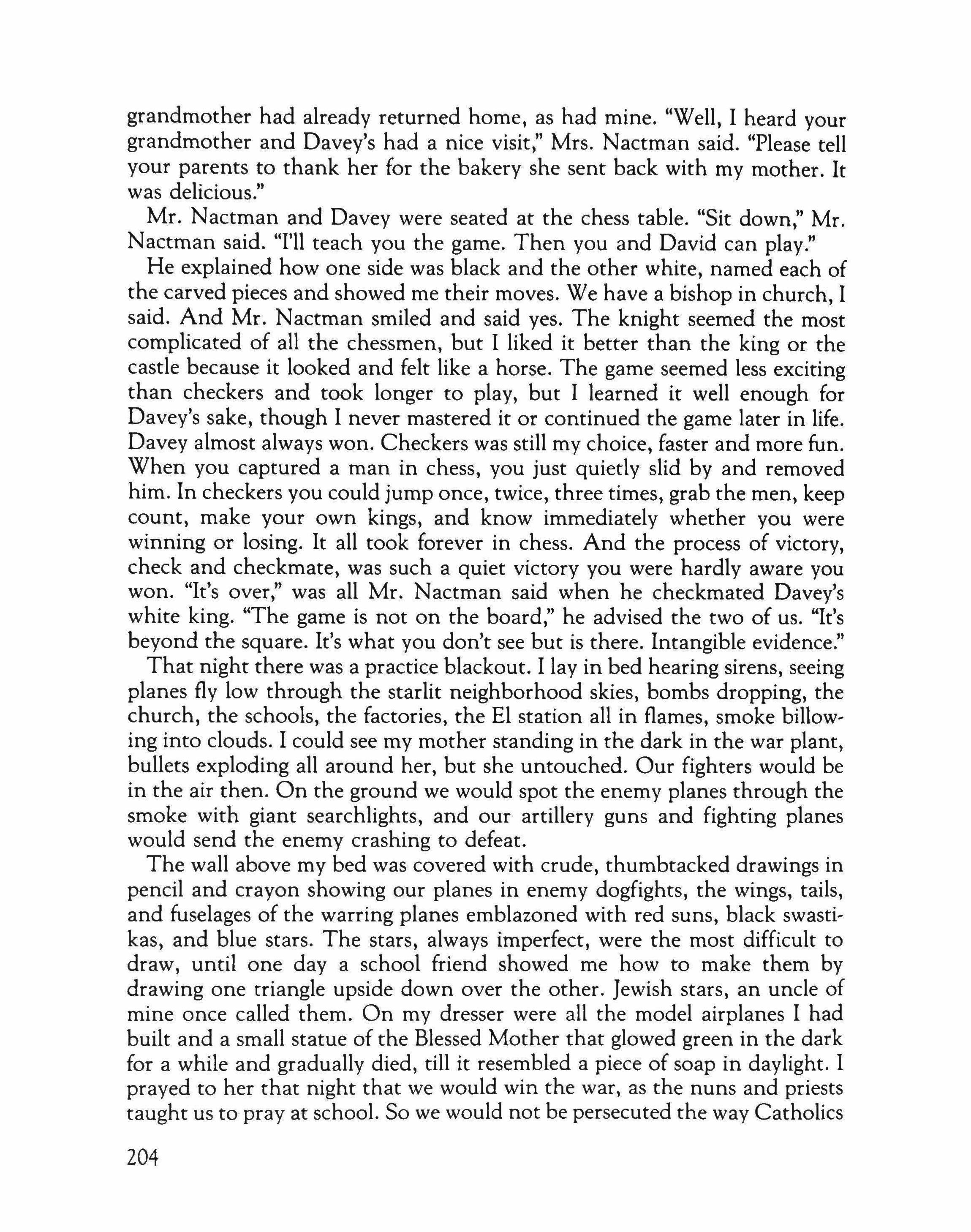
grandmother had already returned home, as had mine. "Well, I heard your grandmother and Davey's had a nice visit," Mrs. Nactman said. "Please tell your parents to thank her for the bakery she sent back with my mother. It was delicious."
Mr. Nactman and Davey were seated at the chess table. "Sit down," Mr. Nactman said. "I'll teach you the game. Then you and David can play."
He explained how one side was black and the other white, named each of the carved pieces and showed me their moves. We have a bishop in church, I said. And Mr. Nactman smiled and said yes. The knight seemed the most complicated of all the chessmen, but I liked it better than the king or the castle because it looked and felt like a horse. The game seemed less exciting than checkers and took longer to play, but I learned it well enough for Davey's sake, though I never mastered it or continued the game later in life. Davey almost always won. Checkers was still my choice, faster and more fun. When you captured a man in chess, you just quietly slid by and removed him. In checkers you could jump once, twice, three times, grab the men, keep count, make your own kings, and know immediately whether you were winning or losing. It all took forever in chess. And the process of victory, check and checkmate, was such a quiet victory you were hardly aware you won. "It's over," was all Mr. Nactman said when he checkmated Davey's white king. "The game is not on the board," he advised the two of us. "It's beyond the square. It's what you don't see but is there. Intangible evidence."
That night there was a practice blackout. I lay in bed hearing sirens, seeing planes fly low through the starlit neighborhood skies, bombs dropping, the church, the schools, the factories, the EI station all in flames, smoke billow, ing into clouds. I could see my mother standing in the dark in the war plant, bullets exploding all around her, but she untouched. Our fighters would be in the air then. On the ground we would spot the enemy planes through the smoke with giant searchlights, and our artillery guns and fighting planes would send the enemy crashing to defeat.
The wall above my bed was covered with crude, thumbtacked drawings in pencil and crayon showing our planes in enemy dogfights, the wings, tails, and fuselages of the warring planes emblazoned with red suns, black swastikas, and blue stars. The stars, always imperfect, were the most difficult to draw, until one day a school friend showed me how to make them by drawing one triangle upside down over the other. Jewish stars, an uncle of mine once called them. On my dresser were all the model airplanes I had built and a small statue of the Blessed Mother that glowed green in the dark for a while and gradually died, till it resembled a piece of soap in daylight. I prayed to her that night that we would win the war, as the nuns and priests taught us to pray at school. So we would not be persecuted the way Catholics
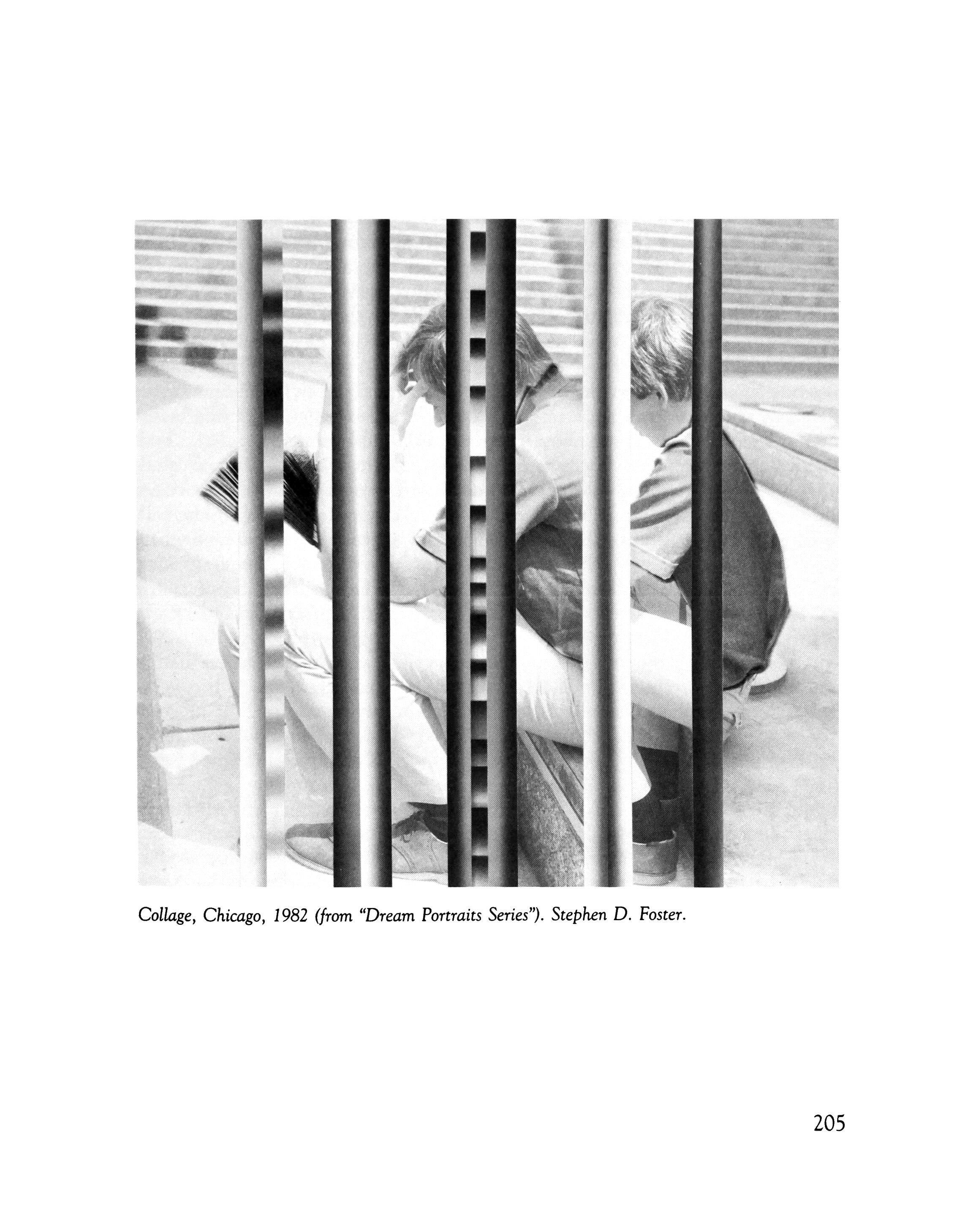

were in other parts of the world, at different times in history. Priests hanging from lampposts, as one nun described it. People burned at the stake like Joan of Arc. Would we, as Catholics, have the strength of martyrs? The courage to suffer and die for our beliefs? I believe in one God, the Father almighty, Maker of heaven and earth, and of all things visible and invisible
Footsteps on the sidewalk, sirens unwinding, Mr. Herdlicka, the block captain's voice joined by other voices and a man's laughter. A flashlight in the gangway rippling the venetian blinds in my bedroom window. I find my father sitting alone in the dark kitchen lit only by the radio dial. "It's over," he said.
The streetlights went on. Neighbors began gathering outside their houses in small groups. Up and down the block, lights in the living rooms began burning, one after another. Trains from the factories began rumbling, whistles and wheels screeching. Fire in the foundries blossomed, and the blue welding light in some factories began flashing in thousands of tiny, frosted, glass windowpanes. An automobile started and moved through gears down the street. The gate man in his shack by the EI station began ringing the bell, pushing the tall levers to lower the black-and-white crossing gates, lighting the red lanterns, carrying them in the darkness to hang on the gates, waiting for the EI train, the windows all lit, to pass by, sparks and blue flashes rolling out of the iron wheels. Old Man Krachi took up his concertina. The neigh, borhood fell into place again.
In the morning when I awoke, two beautiful white lampshades floated above the Czech crystal lamps on each endtable beside the sofa in the living room. Some woman from the factory had made them for my mother. "They're parachute silk:' she told me. "Black market. Don't tell anyone. I have something else for you. A surprise. Just wait. One of these nights, you'll see."
It was Hookstra's idea. Friday, after supper, we would capture Davey on his way home from piano lessons. We would blindfold him, take him prisoner. And we would not let him know who we were. That was important. Absolute silence. We could not give ourselves away. Nolan said he couldn't play because his father was taking him to some church to hear a missionary priest talk about Africa. So that left Hookstra, Krachi, and me.
We waited in the alley, a block before his house, where we knew he would pass by alone. Krachi was lookout and signaled he was coming. We hid behind some garbage cans Hookstra had rummaged and come up with a man's old, black fedora. We waited till he almost crossed the alley, then grabbed him from behind while Hookstra pulled the hat tight over Davey's
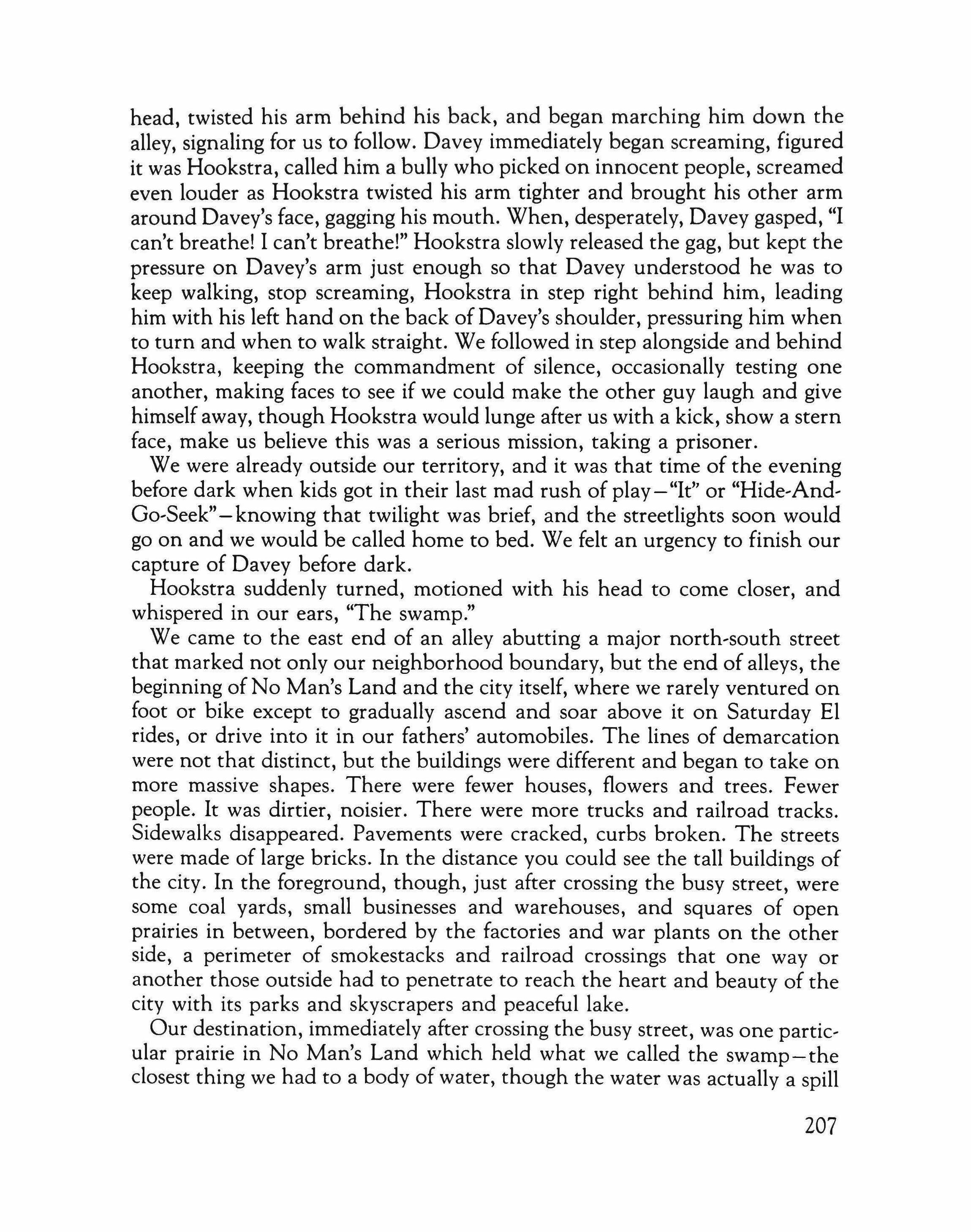
head, twisted his arm behind his back, and began marching him down the alley, signaling for us to follow. Davey immediately began screaming, figured it was Hookstra, called him a bully who picked on innocent people, screamed even louder as Hookstra twisted his arm tighter and brought his other arm around Davey's face, gagging his mouth. When, desperately, Davey gasped, "I can't breathe! I can't breathe!" Hookstra slowly released the gag, but kept the pressure on Davey's arm just enough so that Davey understood he was to keep walking, stop screaming, Hookstra in step right behind him, leading him with his left hand on the back of Davey's shoulder, pressuring him when to turn and when to walk straight. We followed in step alongside and behind Hookstra, keeping the commandment of silence, occasionally testing one another, making faces to see if we could make the other guy laugh and give himself away, though Hookstra would lunge after us with a kick, show a stern face, make us believe this was a serious mission, taking a prisoner.
We were already outside our territory, and it was that time of the evening before dark when kids got in their last mad rush of play - "It" or "Hide'And, Go-Seek" - knowing that twilight was brief, and the streetlights soon would go on and we would be called home to bed. We felt an urgency to finish our capture of Davey before dark.
Hookstra suddenly turned, motioned with his head to come closer, and whispered in our ears, "The swamp."
We came to the east end of an alley abutting a major north-south street that marked not only our neighborhood boundary, but the end of alleys, the beginning of No Man's Land and the city itself, where we rarely ventured on foot or bike except to gradually ascend and soar above it on Saturday EI rides, or drive into it in our fathers' automobiles. The lines of demarcation were not that distinct, but the buildings were different and began to take on more massive shapes. There were fewer houses, flowers and trees. Fewer people. It was dirtier, noisier. There were more trucks and railroad tracks. Sidewalks disappeared. Pavements were cracked, curbs broken. The streets were made of large bricks. In the distance you could see the tall buildings of the city. In the foreground, though, just after crossing the busy street, were some coal yards, small businesses and warehouses, and squares of open prairies in between, bordered by the factories and war plants on the other side, a perimeter of smokestacks and railroad crossings that one way or another those outside had to penetrate to reach the heart and beauty of the city with its parks and skyscrapers and peaceful lake.
Our destination, immediately after crossing the busy street, was one partie, ular prairie in No Man's Land which held what we called the swamp-the closest thing we had to a body of water, though the water was actually a spill

of muck with the consistency of paint that flowed from the nearby factories, gray, brown, and salmon-colored sludge with pools of rusty water floating on top.
Perhaps once or twice a year we ventured this far, just to see the swamp, and always without our parents knowing, though our shoes were wet and clothing tainted upon our return, and we harbored a peculiar smell. "Where were you?" our parents would ask. "Just playing," we replied.
We imagined it a jungle, a wilderness, where one might encounter wild animals and bright-colored birds, though little evidence of such life existed but for weeds and foul water. Inevitably a grimness set in. Our games turned more self-absorbing, petulant, seeing who could push whom into the mucky swamp first. Pushing and shoving matches leading to fights, ending in tears and flight. Someone was always running home hurt and angry. We never stayed long at the swamp. But its very existence, like the factories, remained a compelling attraction. It heightened our everyday fun for no other reason than we were not where we were supposed to be.
As soon as the prairie turned soft under our feet, Davey said: "I know where we are, Hookstra. The swamp. I can smell it. You win, O.K.? My feet are all wet. Let go of my arm, you jerk. It hurts." Hookstra forced him to sit down in it, then pulled him back up, giving his arm another twist. He was angry that Davey had figured it all out.
"Damn it, Hookstra, that's enough! I'm all wet. Are you happy? My arm is numb. Let's go." I was relieved that it was all over and beginning to get dark. We'd head for home now, racing to get back before the streetlights went on. At least Krachi and I had fooled Davey. He'd be surprised to know we were along.
I thought Hookstra and Davey would be better friends now. At least he didn't cry or try to break away. He'd been a good prisoner, and he didn't even mind that goofy black hat pulled down over his head. He went along with it all once he understood no one was talking, and it was up to him to try and figure out who had captured him and where he was being taken.
Even Krachi thought we had called it quits and began pulling the hat from Davey's head, when suddenly Hookstra punched him in the arm. I expected Hookstra to start laughing now. He would do that sometimes when he lost or had gone too far. He could even reduce your own victory to something meaningless by laughing at you. He would ease the tension, get out of a losing battle by suddenly turning everything around so you would believe it was all a big joke, exactly the way he had planned, and there were no hard feelings. But Krachi swung back at Hookstra, and neither of them moved. They glared at each other in a standstill, Hookstra still holding onto Davey's
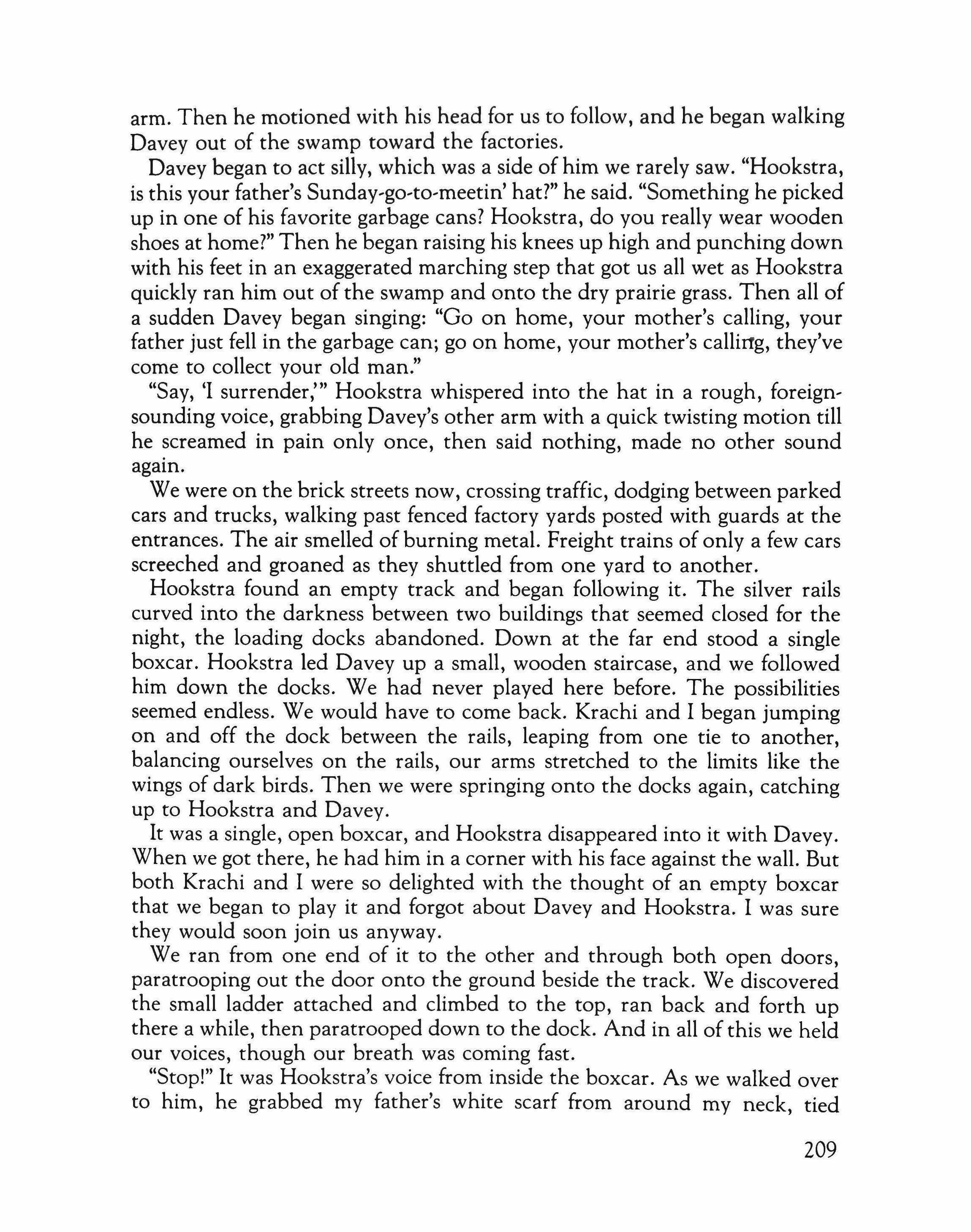
arm. Then he motioned with his head for us to follow, and he began walking Davey out of the swamp toward the factories.
Davey began to act silly, which was a side of him we rarely saw. "Hoekstra, is this your father's Sunday-go-to-meetin' hat?" he said. "Something he picked up in one of his favorite garbage cans? Hookstra, do you really wear wooden shoes at home?" Then he began raising his knees up high and punching down with his feet in an exaggerated marching step that got us all wet as Hookstra quickly ran him out of the swamp and onto the dry prairie grass. Then all of a sudden Davey began singing: "Go on home, your mother's calling, your father just fell in the garbage can; go on home, your mother's calling, they've come to collect your old man."
"Say, 'I surrender,'" Hookstra whispered into the hat in a rough, foreign, sounding voice, grabbing Davey's other arm with a quick twisting motion till he screamed in pain only once, then said nothing, made no other sound again.
We were on the brick streets now, crossing traffic, dodging between parked cars and trucks, walking past fenced factory yards posted with guards at the entrances. The air smelled of burning metal. Freight trains of only a few cars screeched and groaned as they shuttled from one yard to another.
Hookstra found an empty track and began following it. The silver rails curved into the darkness between two buildings that seemed closed for the night, the loading docks abandoned. Down at the far end stood a single boxcar. Hookstra led Davey up a small, wooden staircase, and we followed him down the docks. We had never played here before. The possibilities seemed endless. We would have to come back. Krachi and I began jumping on and off the dock between the rails, leaping from one tie to another, balancing ourselves on the rails, our arms stretched to the limits like the wings of dark birds. Then we were springing onto the docks again, catching up to Hookstra and Davey.
It was a single, open boxcar, and Hookstra disappeared into it with Davey. When we got there, he had him in a corner with his face against the wall. But both Krachi and I were so delighted with the thought of an empty boxcar that we began to play it and forgot about Davey and Hookstra. I was sure they would soon join us anyway.
We ran from one end of it to the other and through both open doors, paratrooping out the door onto the ground beside the track. We discovered the small ladder attached and climbed to the top, ran back and forth up there a while, then paratrooped down to the dock. And in all of this we held our voices, though our breath was coming fast.
"Stop!" It was Hookstra's voice from inside the boxcar. As we walked over to him, he grabbed my father's white scarf from around my neck, tied

Davey's hands together, then spun him around and around, motioning for us to start running.
Looking over my shoulder, I could see Hookstra struggling to pull the door of the boxcar shut then take off shouting, "Run! Run!" as he passed us. We ran blindly down the dock, onto the railroad bed and out of the yard. Someone behind was blowing a whistle. We split up on the factory streets, the way we often did in our games when something went wrong and there was the danger anyone of us could be blamed. I turned a corner and thought I saw both Krachi and Hookstra cross a busy street, safe in their own terri, tory. I could not keep up. The pain in my side from running hurt so much, I had to rest a minute and then walk.
There was no one behind me. I walked past another block offenced factory yards, thought of going back and walking home with Davey, but was afraid the guards would get me. Besides, it was dark and I wasn't sure I could find the tracks and the boxcar. Factory whistles were blowing. Trucks moving. Trains pulling out of the yards. Machines were pounding the earth so hard I could feel it shudder beneath my feet. I passed a foundry which seemed all in flames. I passed dark factory windows that flashed blue and silver and black in steady waves. I passed a fenced war plant with black and yellow "Forbid, den to Enter" signs where a 1941 Plymouth coupe I seemed to recognize was parked against a brick wall beneath a single lightbulb stuck in a cage. It was a car like the one I sometimes saw my mother get out of a few blocks from home on Saturday mornings when I would be out early playing, and occasionally start walking to meet her on her way home from work. I saw a man and a woman kissing in the car and, afraid of being seen, I started running again till I couldn't even feel the pain.
From the brick street where I stood waiting to cross, clouds of black smoke drifted past occasional patches of stars. In the distance, either moving toward or away from me, I could barely discern the figure of a man and a wagon and a horse.
The streetlights were on in front of my house, as they are now, though the light is so different. I opened the door with my own key and went into the kitchen where my father sat at the table reading the newspaper. "It's late," he said. "Get ready for bed. I'll heat up the soup on the stove."
Nothing more was said, as I recall years later. The war ended. Things changed. We went on to public or parochial high schools. We had our first experiences with girls, fresh, unabiding love that all our lives we would seek to know again with some degree of permanence in other women. We learned to drive our fathers' cars, then bought old ones of our own to customize and paint to suit our taste for speed and color. We kept our hair cropped short
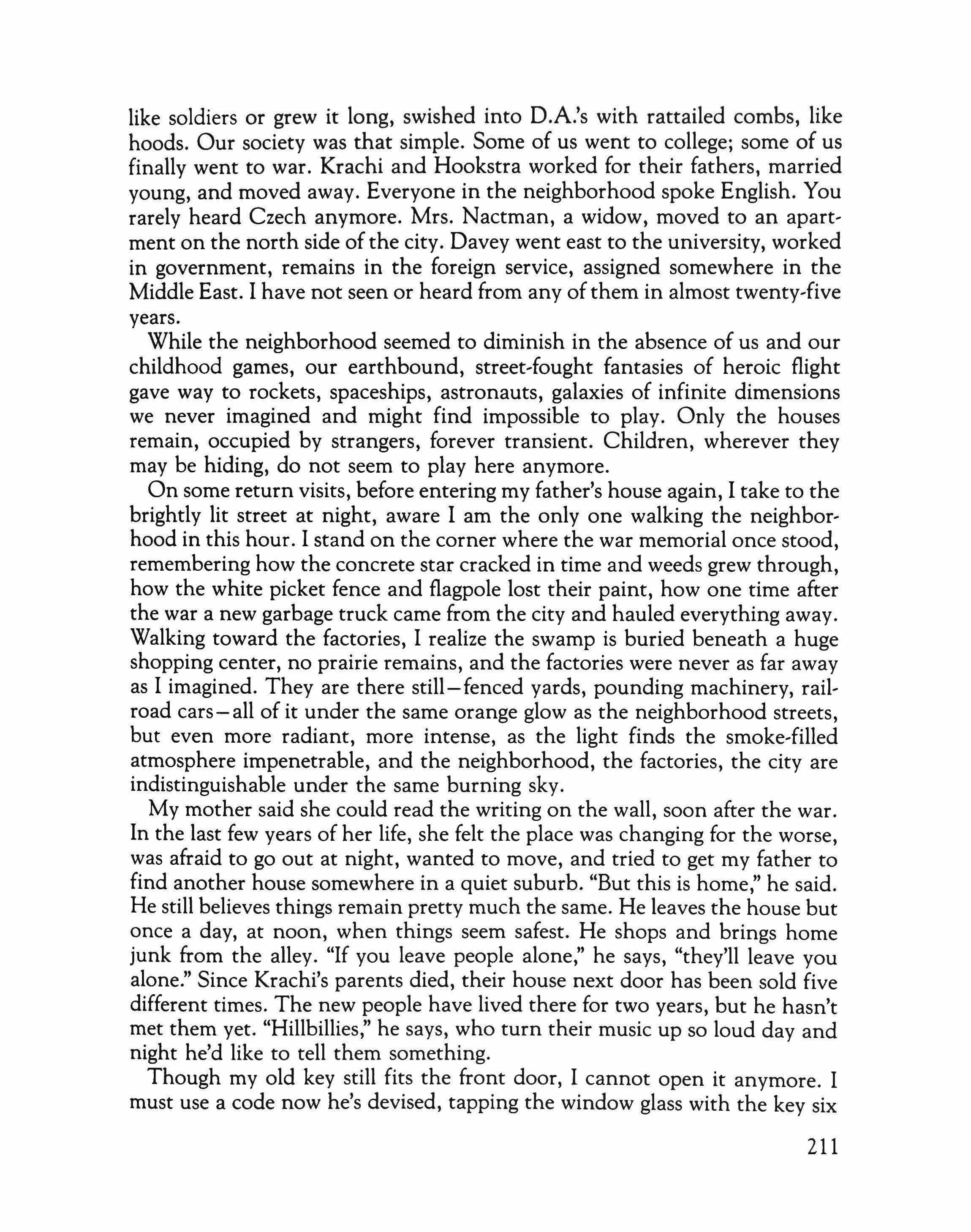
like soldiers or grew it long, swished into D.A.'s with rattailed combs, like hoods. Our society was that simple. Some of us went to college; some of us finally went to war. Krachi and Hookstra worked for their fathers, married young, and moved away. Everyone in the neighborhood spoke English. You rarely heard Czech anymore. Mrs. Nactman, a widow, moved to an apart, ment on the north side ofthe city. Davey went east to the university, worked in government, remains in the foreign service, assigned somewhere in the Middle East. I have not seen or heard from any ofthem in almost twenty-five years.
While the neighborhood seemed to diminish in the absence of us and our childhood games, our earthbound, street-fought fantasies of heroic flight gave way to rockets, spaceships, astronauts, galaxies of infinite dimensions we never imagined and might find impossible to play. Only the houses remain, occupied by strangers, forever transient. Children, wherever they may be hiding, do not seem to play here anymore.
On some return visits, before entering my father's house again, I take to the brightly lit street at night, aware I am the only one walking the neighbor' hood in this hour. I stand on the corner where the war memorial once stood, remembering how the concrete star cracked in time and weeds grew through, how the white picket fence and flagpole lost their paint, how one time after the war a new garbage truck came from the city and hauled everything away. Walking toward the factories, I realize the swamp is buried beneath a huge shopping center, no prairie remains, and the factories were never as far away as I imagined. They are there still-fenced yards, pounding machinery, rail, road cars-all of it under the same orange glow as the neighborhood streets, but even more radiant, more intense, as the light finds the smoke-filled atmosphere impenetrable, and the neighborhood, the factories, the city are indistinguishable under the same burning sky.
My mother said she could read the writing on the wall, soon after the war. In the last few years of her life, she felt the place was changing for the worse, was afraid to go out at night, wanted to move, and tried to get my father to find another house somewhere in a quiet suburb. "But this is home," he said. He still believes things remain pretty much the same. He leaves the house but once a day, at noon, when things seem safest. He shops and brings home junk from the alley. "If you leave people alone," he says, "they'll leave you alone." Since Krachi's parents died, their house next door has been sold five different times. The new people have lived there for two years, but he hasn't met them yet. "Hillbillies," he says, who turn their music up so loud day and night he'd like to tell them something.
Though myoid key still fits the front door, I cannot open it anymore. I must use a code now he's devised, tapping the window glass with the key six
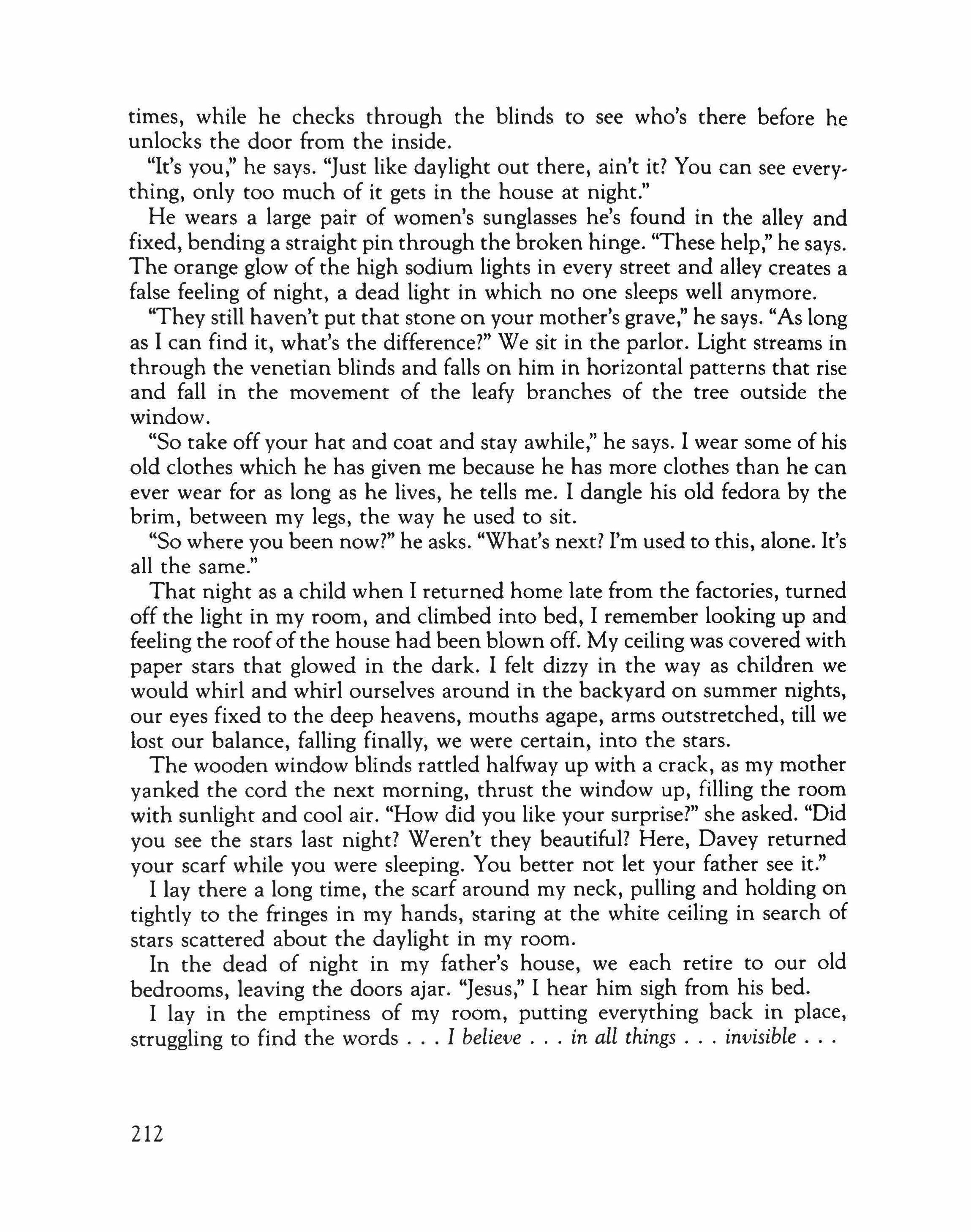
times, while he checks through the blinds to see who's there before he unlocks the door from the inside.
"It's you," he says. "Just like daylight out there, ain't it? You can see every, thing, only too much of it gets in the house at night."
He wears a large pair of women's sunglasses he's found in the alley and fixed, bending a straight pin through the broken hinge. "These help," he says. The orange glow of the high sodium lights in every street and alley creates a false feeling of night, a dead light in which no one sleeps well anymore.
"They still haven't put that stone on your mother's grave," he says. "As long as I can find it, what's the difference?" We sit in the parlor. Light streams in through the venetian blinds and falls on him in horizontal patterns that rise and fall in the movement of the leafy branches of the tree outside the window.
"So take off your hat and coat and stay awhile," he says. I wear some of his old clothes which he has given me because he has more clothes than he can ever wear for as long as he lives, he tells me. I dangle his old fedora by the brim, between my legs, the way he used to sit.
"So where you been now?" he asks. "What's next? I'm used to this, alone. It's all the same."
That night as a child when I returned home late from the factories, turned off the light in my room, and climbed into bed, I remember looking up and feeling the roofofthe house had been blown off. My ceiling was covered with paper stars that glowed in the dark. I felt dizzy in the way as children we would whirl and whirl ourselves around in the backyard on summer nights, our eyes fixed to the deep heavens, mouths agape, arms outstretched, till we lost our balance, falling finally, we were certain, into the stars.
The wooden window blinds rattled halfway up with a crack, as my mother yanked the cord the next morning, thrust the window up, filling the room with sunlight and cool air. "How did you like your surprise?" she asked. "Did you see the stars last night? Weren't they beautiful? Here, Davey returned your scarf while you were sleeping. You better not let your father see it."
I lay there a long time, the scarf around my neck, pulling and holding on tightly to the fringes in my hands, staring at the white ceiling in search of stars scattered about the daylight in my room.
In the dead of night in my father's house, we each retire to our old bedrooms, leaving the doors ajar. "Jesus," I hear him sigh from his bed.
I lay in the emptiness of my room, putting everything back in place, struggling to find the words I believe in all things invisible
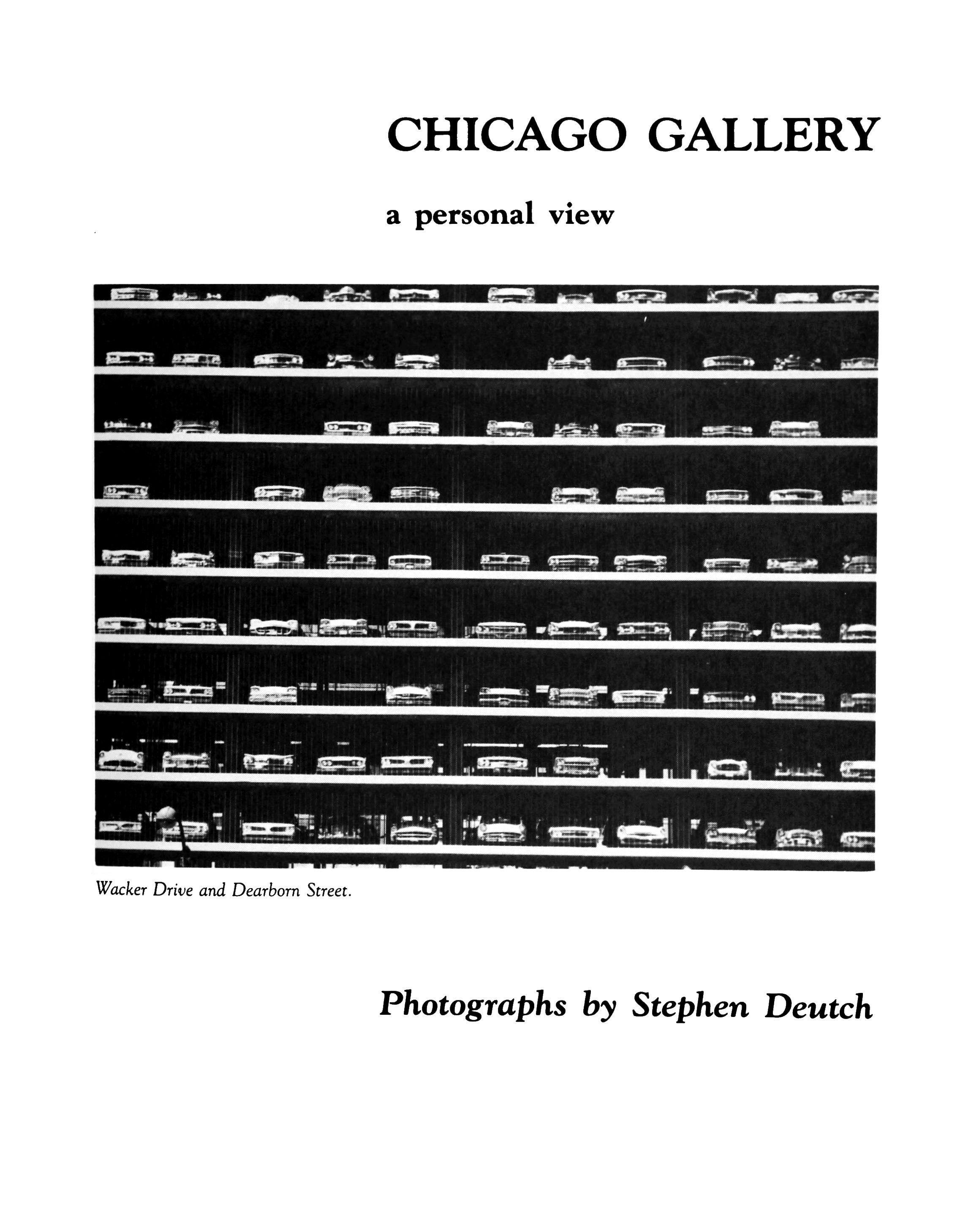
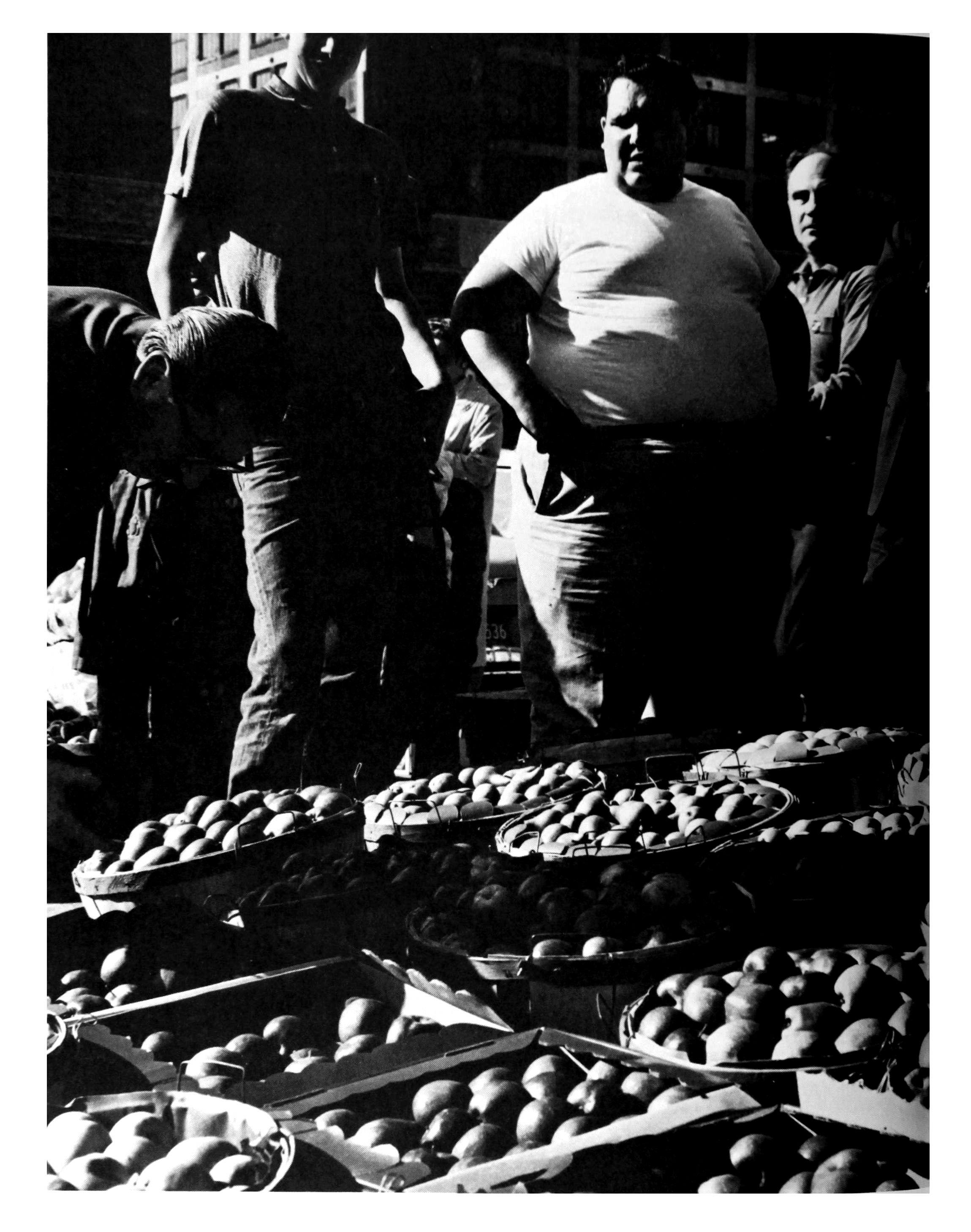
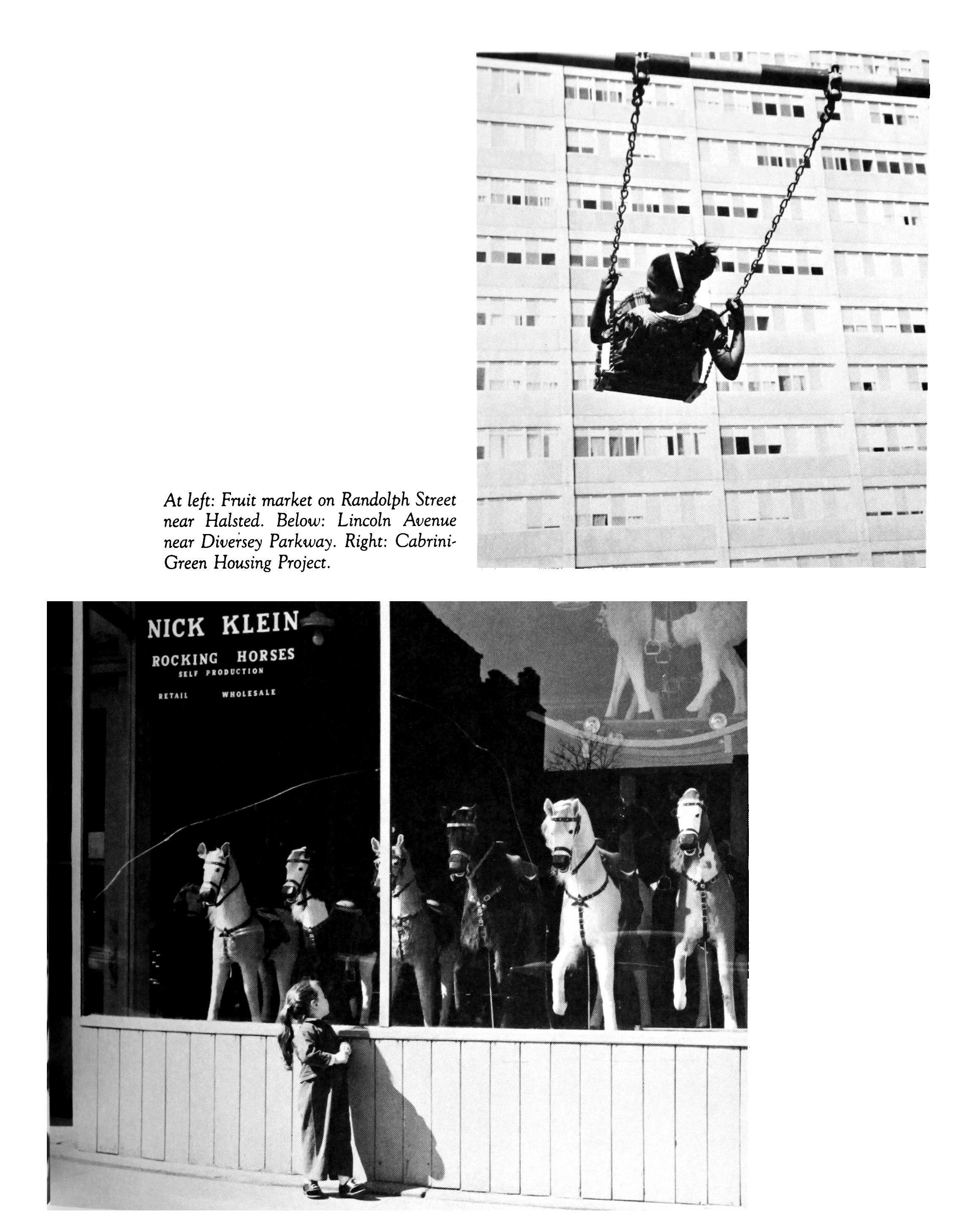
At left: Fruit market on Randolph Street -r'"'"near Halsted. Below: Lincoln Avenue near Diversey Parkway. Right: CabriniGreen Housing Project.
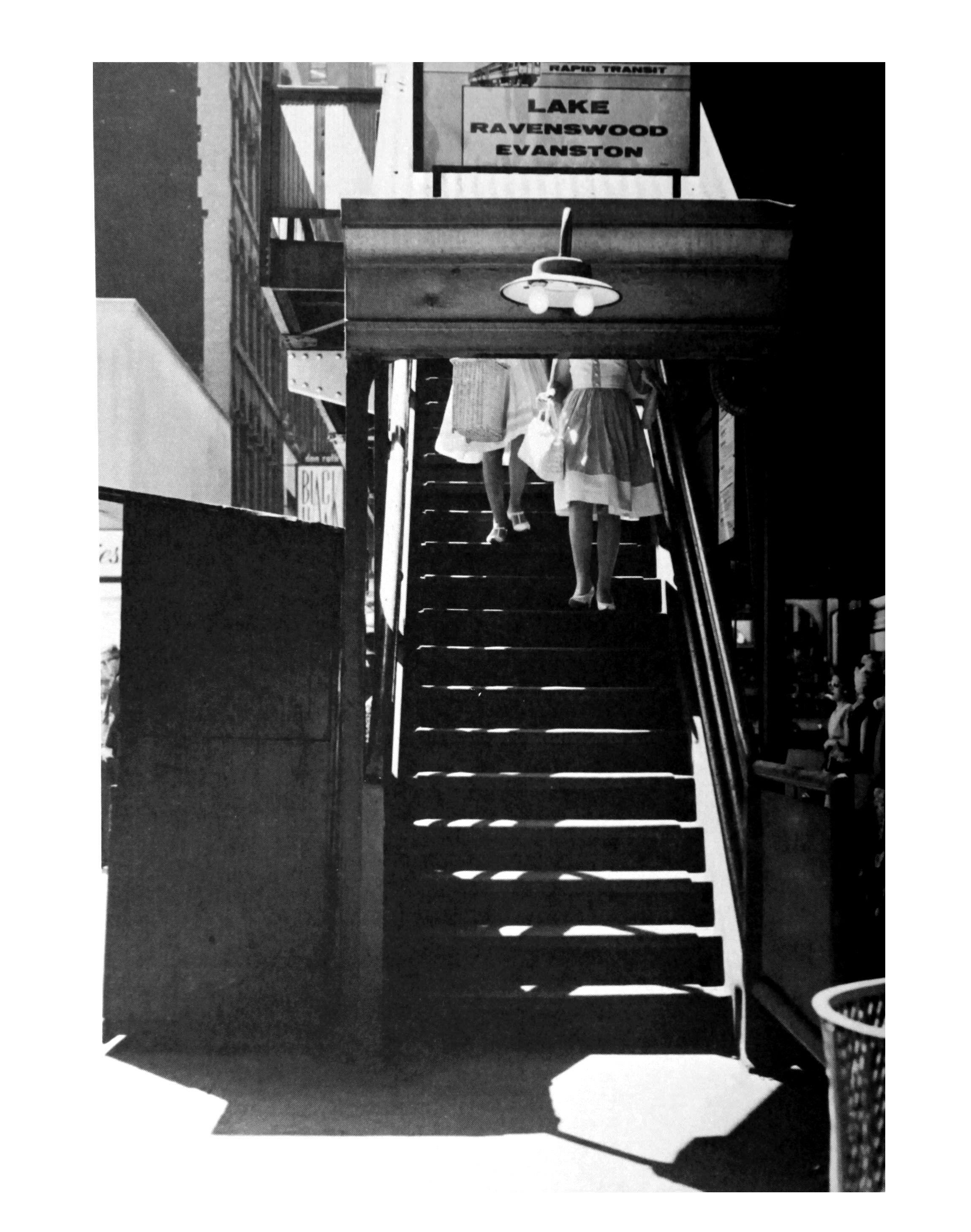
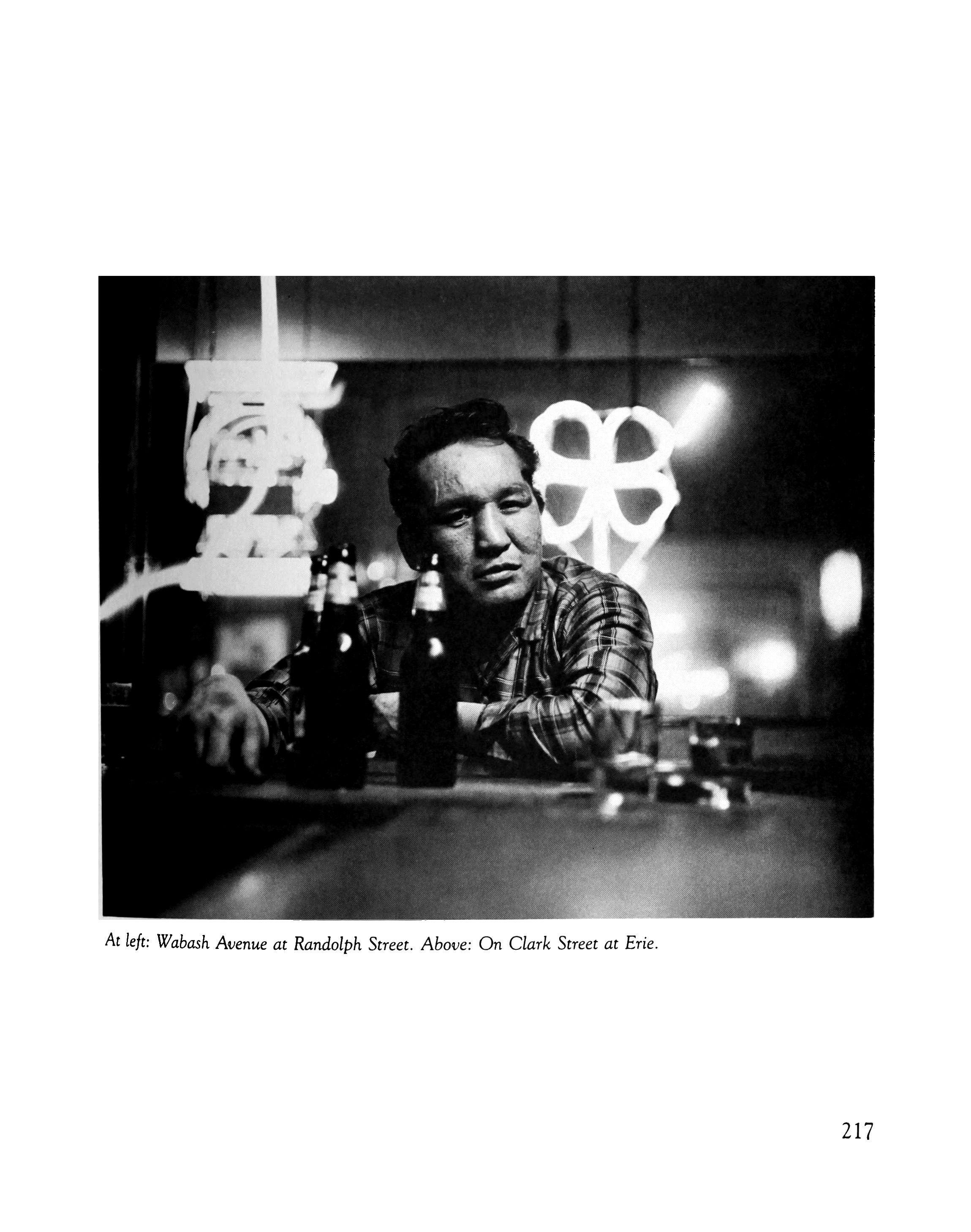
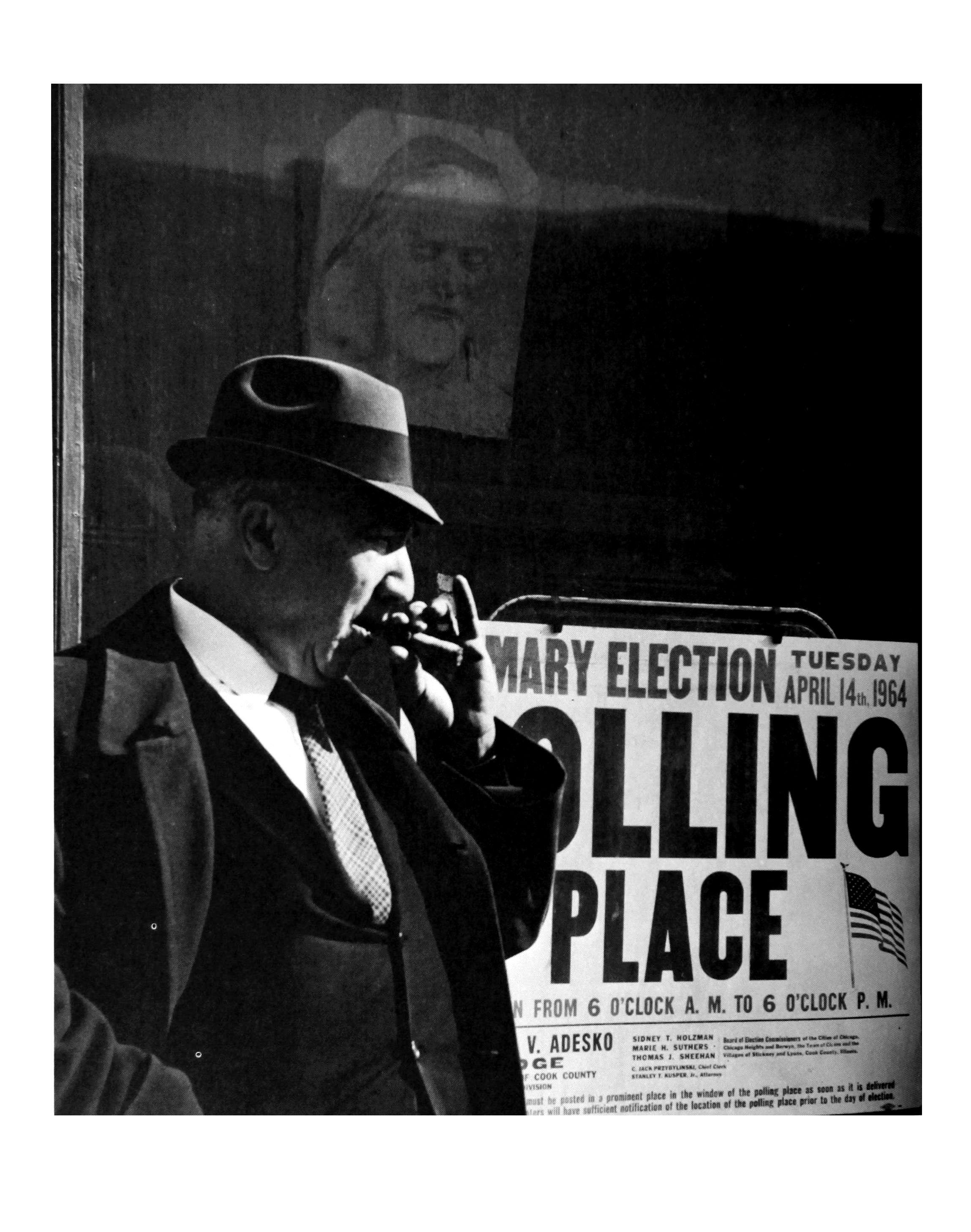
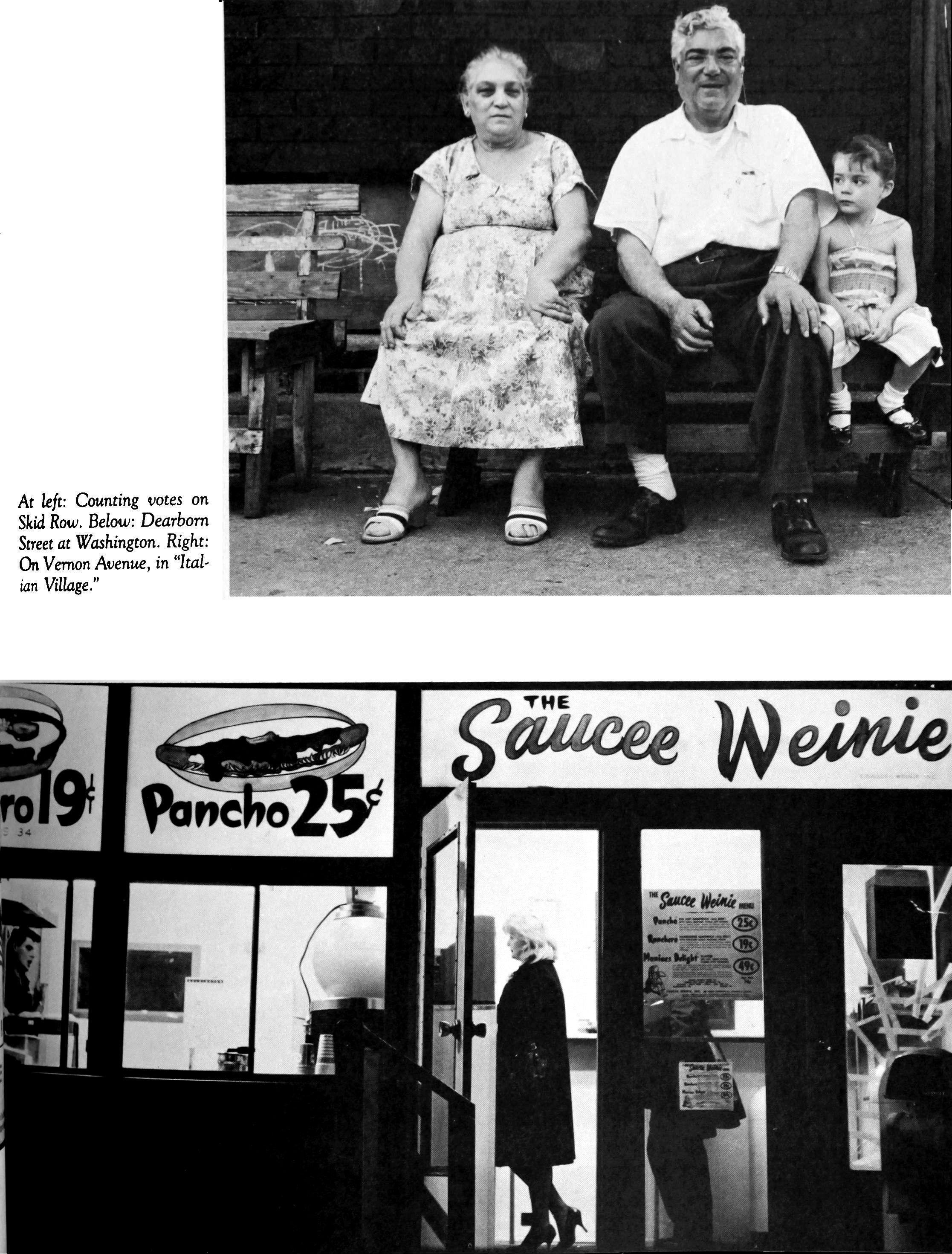 At. left: Counting votes on Skid Row. Below: Dearborn Street at Washington. Right: � Vernon Avenue, in "Italzm Village."
At. left: Counting votes on Skid Row. Below: Dearborn Street at Washington. Right: � Vernon Avenue, in "Italzm Village."
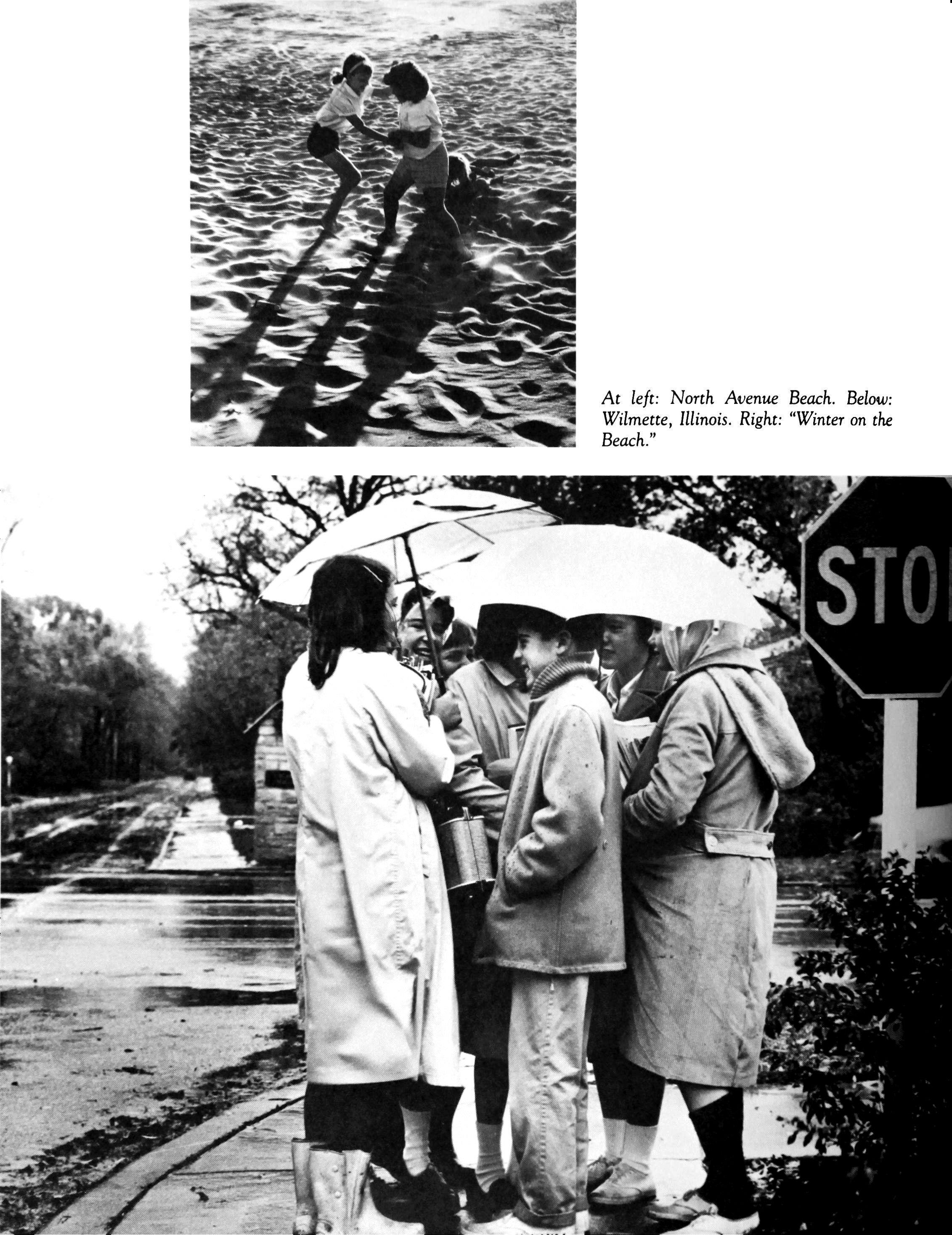 At left: North Avenue Beach. Below: Wilmette, Illinois. Right: "Winter on the Beach."
At left: North Avenue Beach. Below: Wilmette, Illinois. Right: "Winter on the Beach."


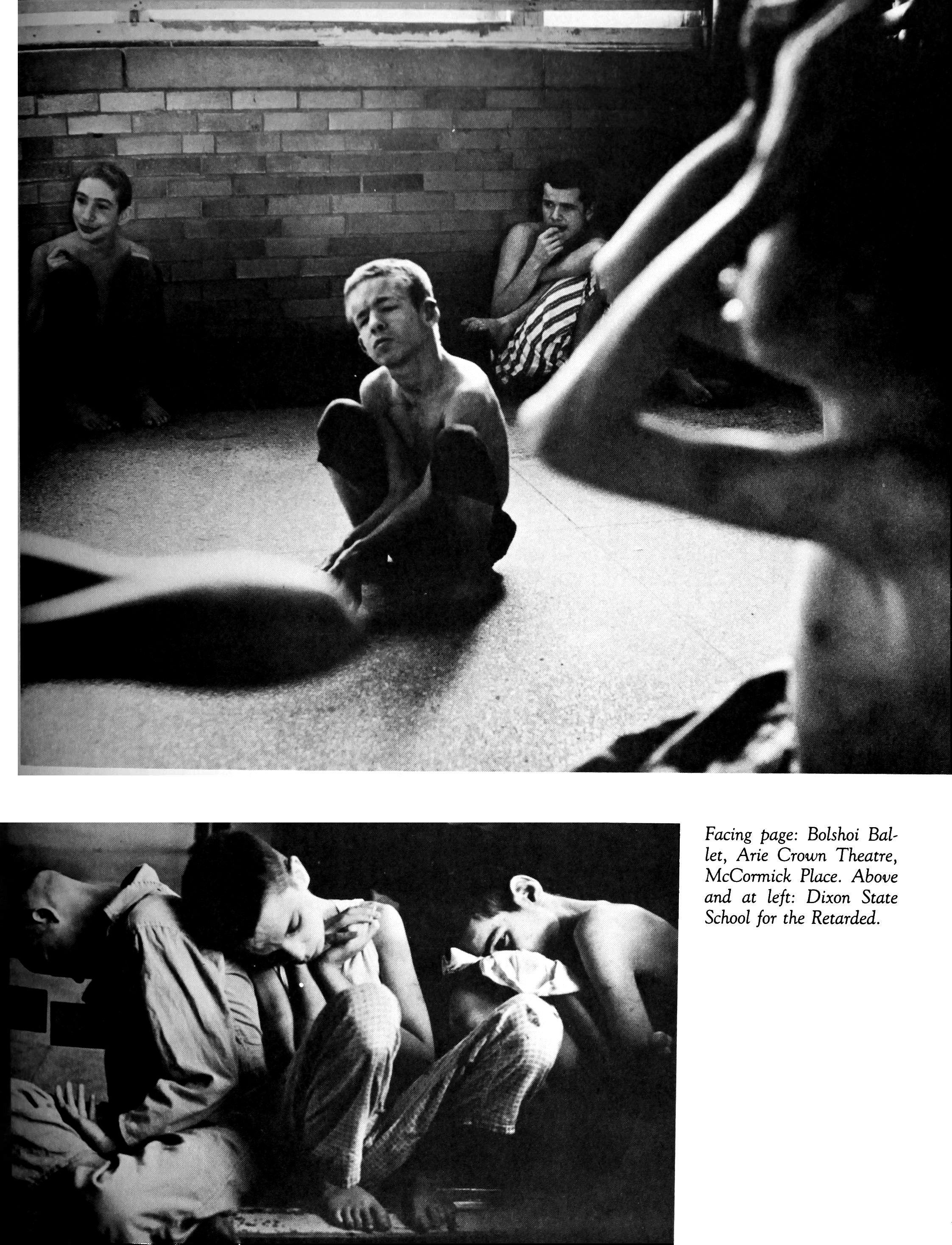 Facing page: Bolshoi Ballet, Arie Crown Theatre, McCormick Place. Above and at left: Dixon State School for the Retarded.
Facing page: Bolshoi Ballet, Arie Crown Theatre, McCormick Place. Above and at left: Dixon State School for the Retarded.
Woody Guthrie and
die Ledbetter) in Deutch's North Side apartment. Right: elybourn Avenue at Division Street. Facing Page: Michigan Avenue at Fifty-third Street. •
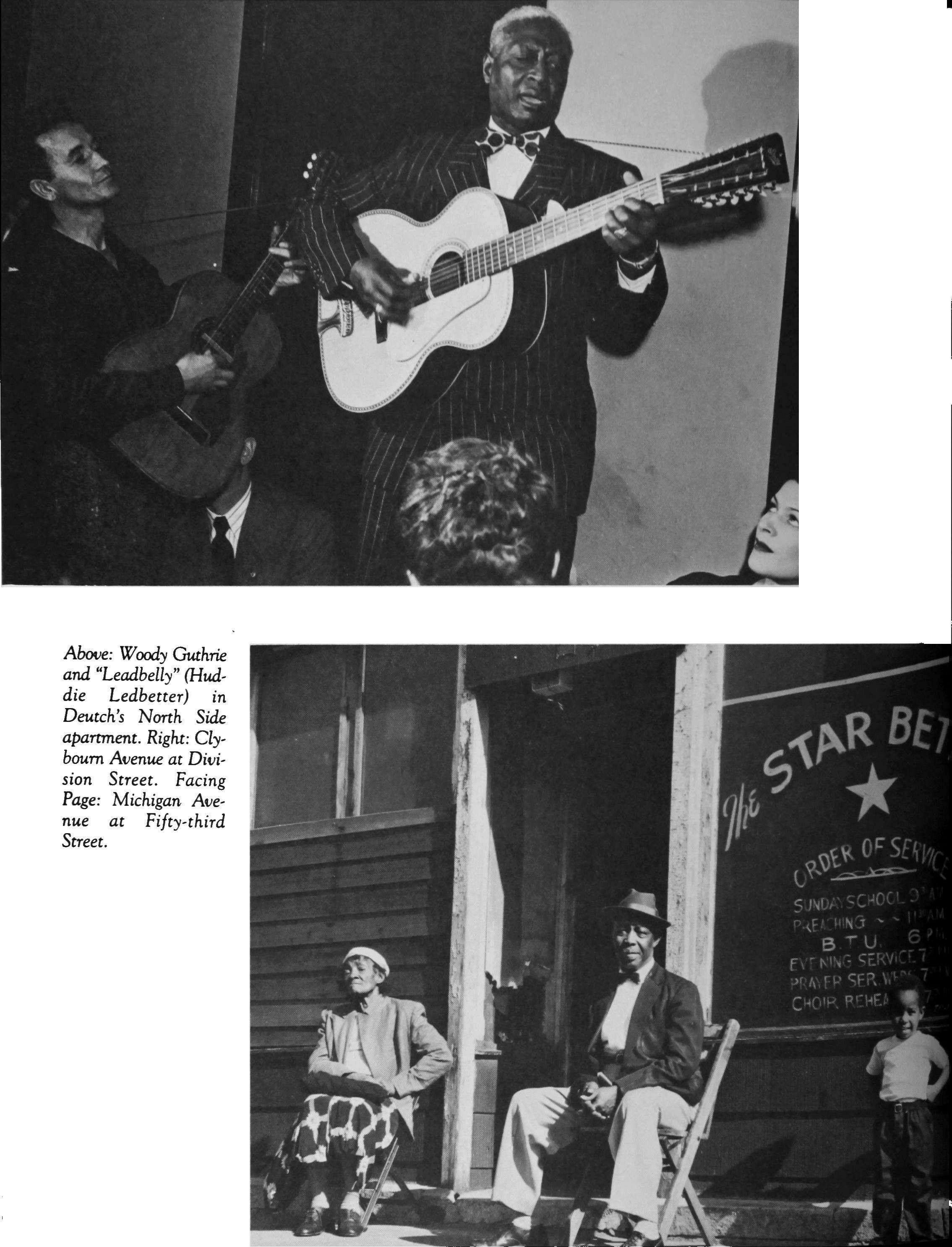 Above:
"Leadbelly" (Hud
Above:
"Leadbelly" (Hud
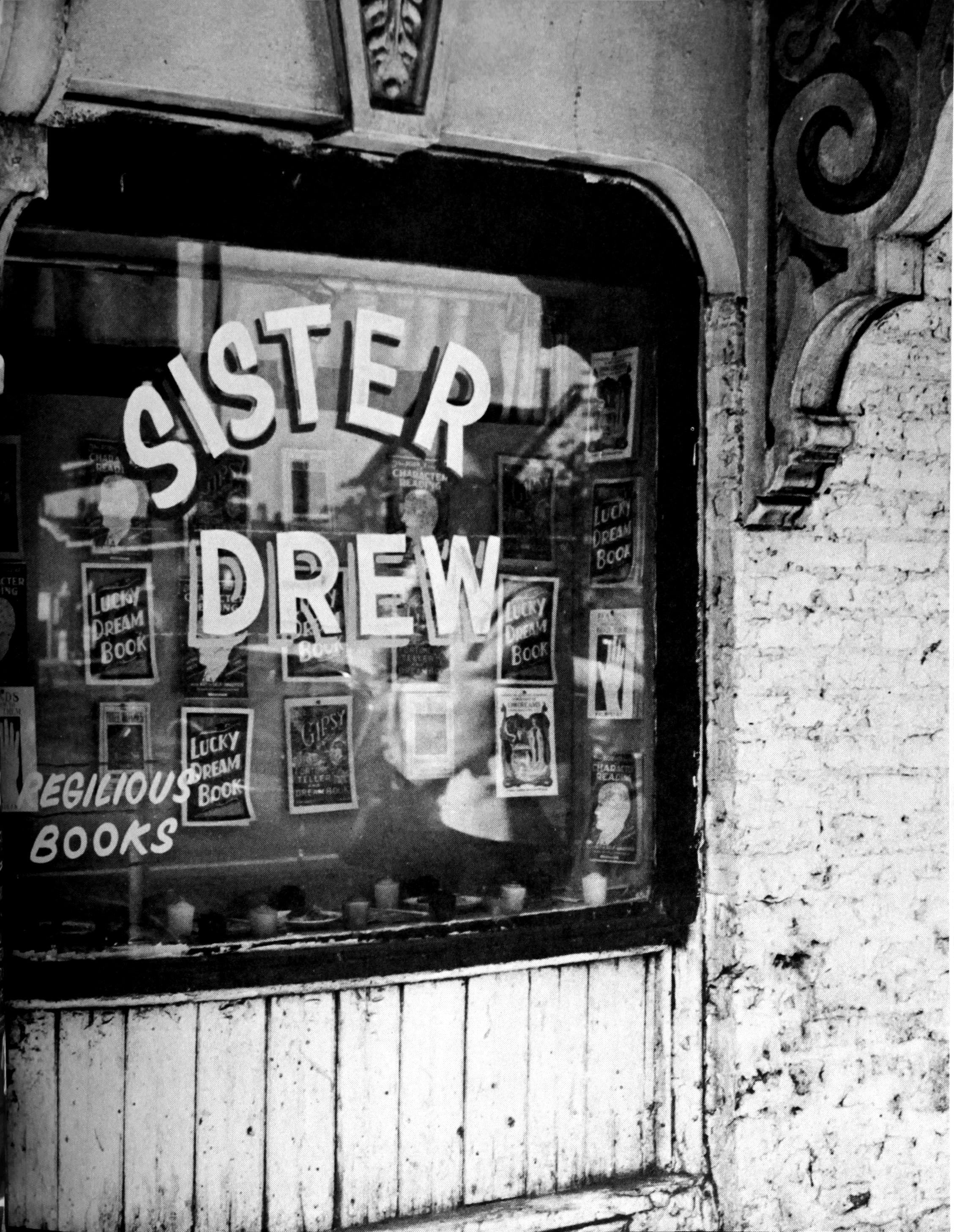
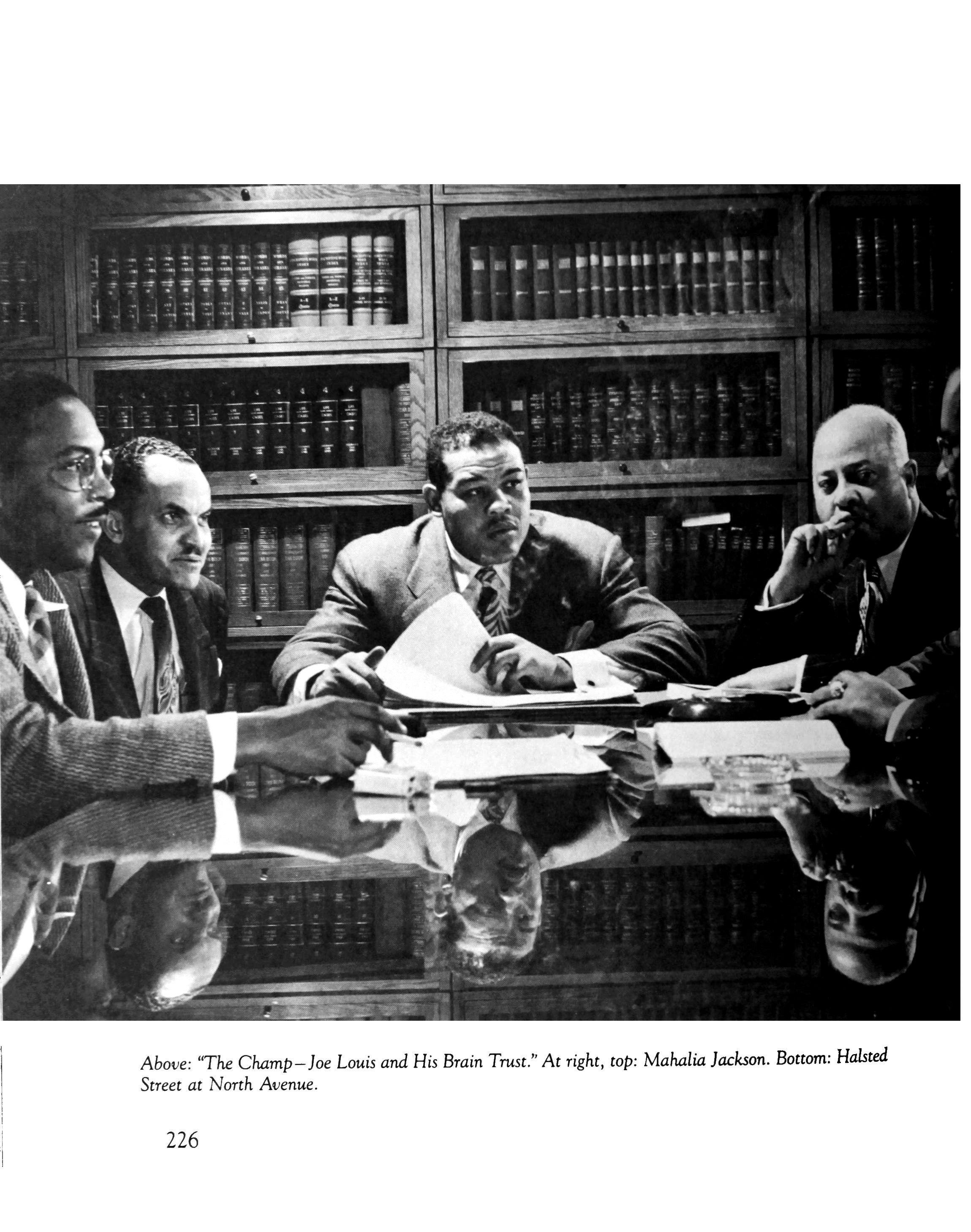


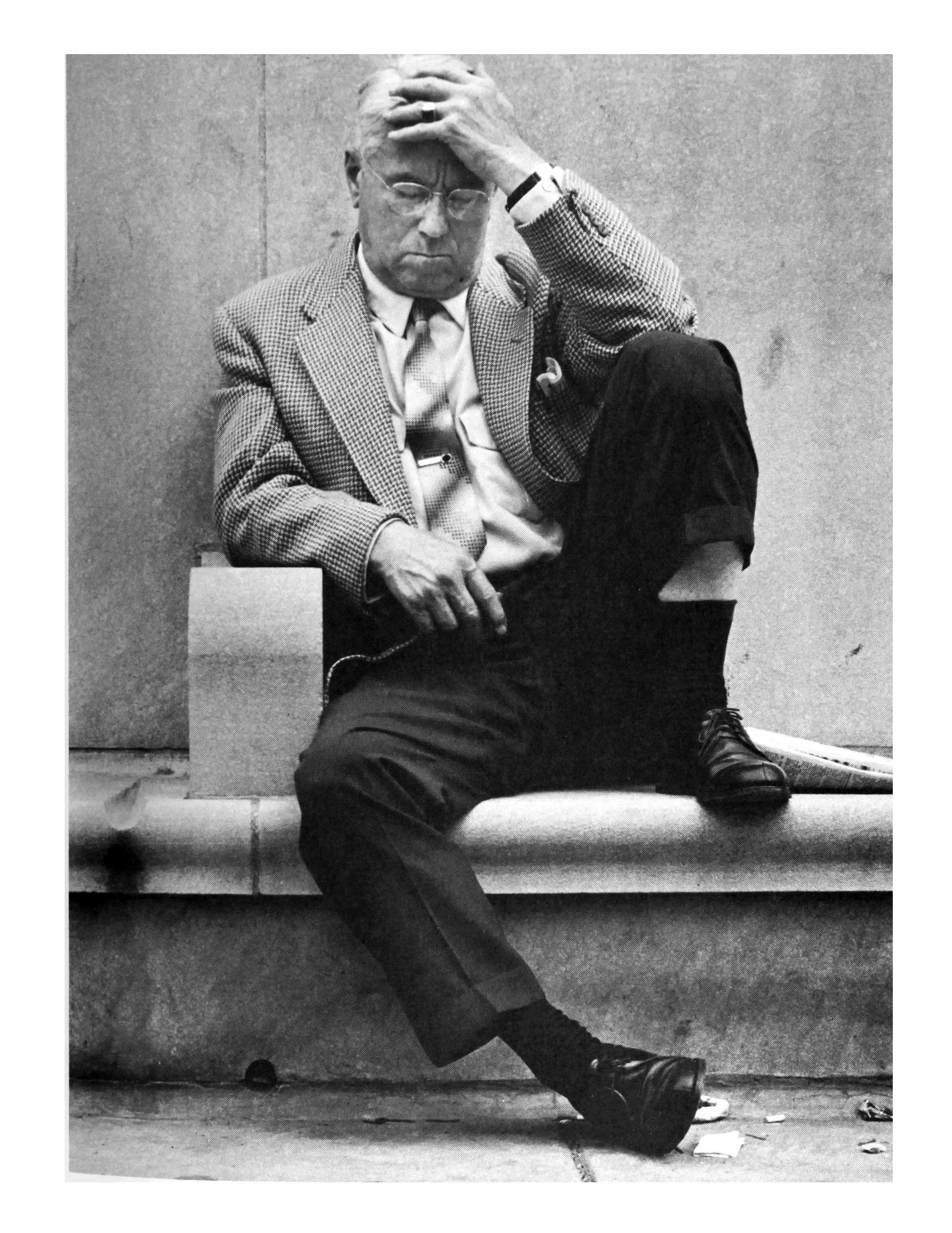
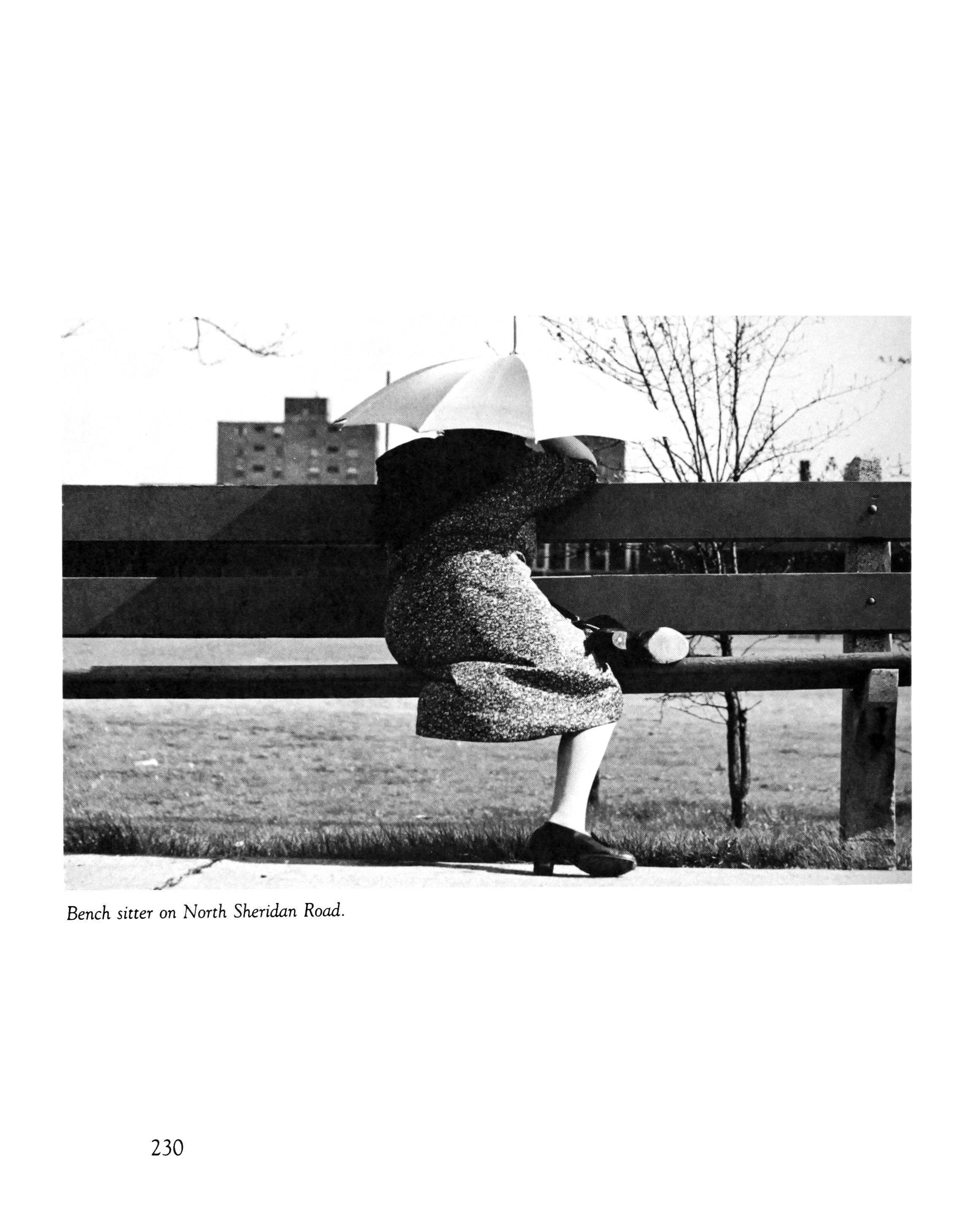
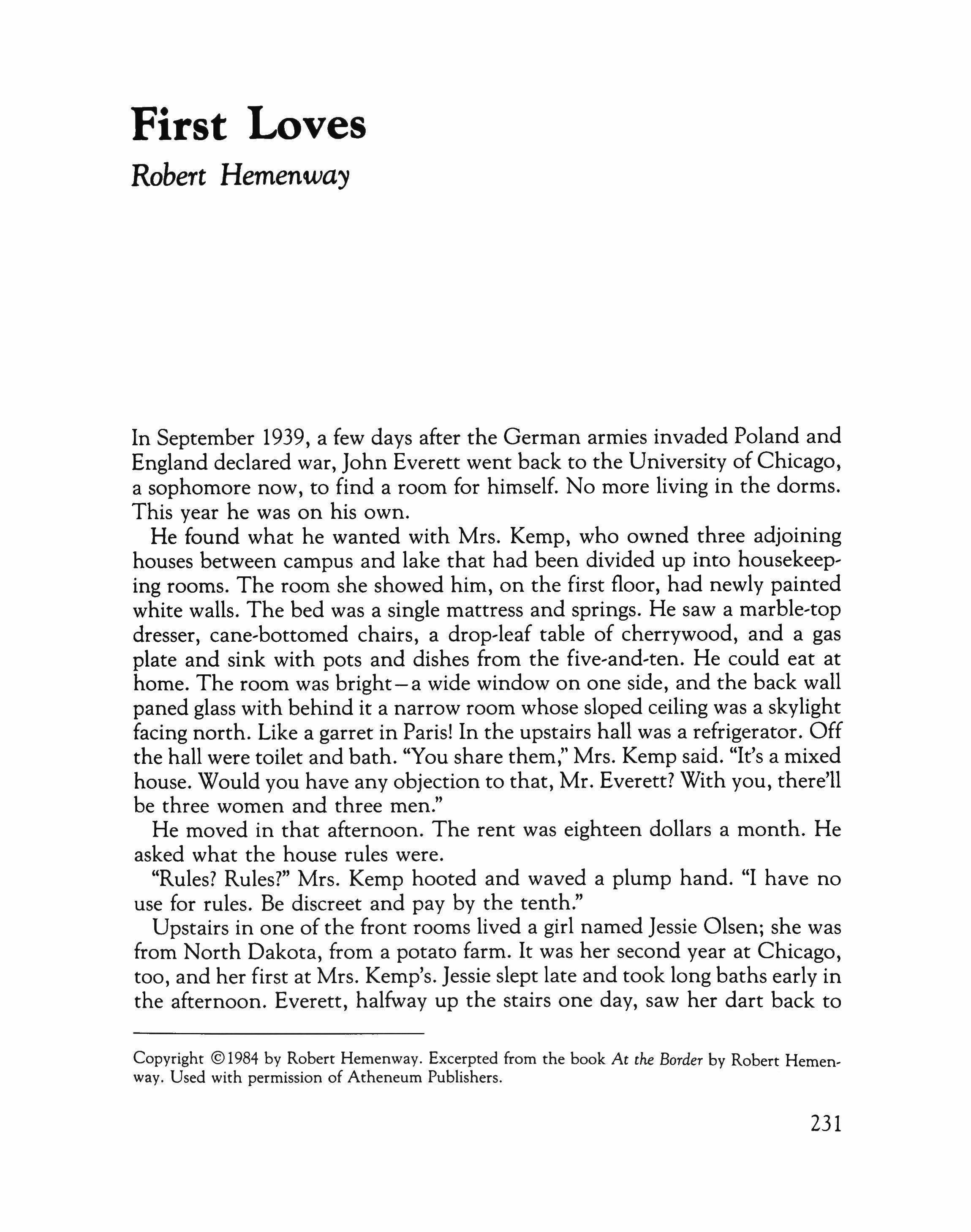
In September 1939, a few days after the German armies invaded Poland and England declared war, John Everett went back to the University of Chicago, a sophomore now, to find a room for himself. No more living in the dorms. This year he was on his own.
He found what he wanted with Mrs. Kemp, who owned three adjoining houses between campus and lake that had been divided up into housekeeping rooms. The room she showed him, on the first floor, had newly painted white walls. The bed was a single mattress and springs. He saw a marble-top dresser, cane-bottomed chairs, a drop-leaf table of cherrywood, and a gas plate and sink with pots and dishes from the five-and-ten. He could eat at home. The room was bright - a wide window on one side, and the back wall paned glass with behind it a narrow room whose sloped ceiling was a skylight facing north. Like a garret in Paris! In the upstairs hall was a refrigerator. Off the hall were toilet and bath. "You share them," Mrs. Kemp said. "It's a mixed house. Would you have any objection to that, Mr. Everett? With you, there'll be three women and three men."
He moved in that afternoon. The rent was eighteen dollars a month. He asked what the house rules were.
"Rules? Rules?" Mrs. Kemp hooted and waved a plump hand. "I have no use for rules. Be discreet and pay by the tenth."
Upstairs in one of the front rooms lived a girl named Jessie Olsen; she was from North Dakota, from a potato farm. It was her second year at Chicago, too, and her first at Mrs. Kemp's. Jessie slept late and took long baths early in the afternoon. Everett, halfway up the stairs one day, saw her dart back to
Copyright © 1984 by Robert Hemenway. Excerpted from the book At the Border by Robert Hemenway. Used with permission of Atheneum Publishers.
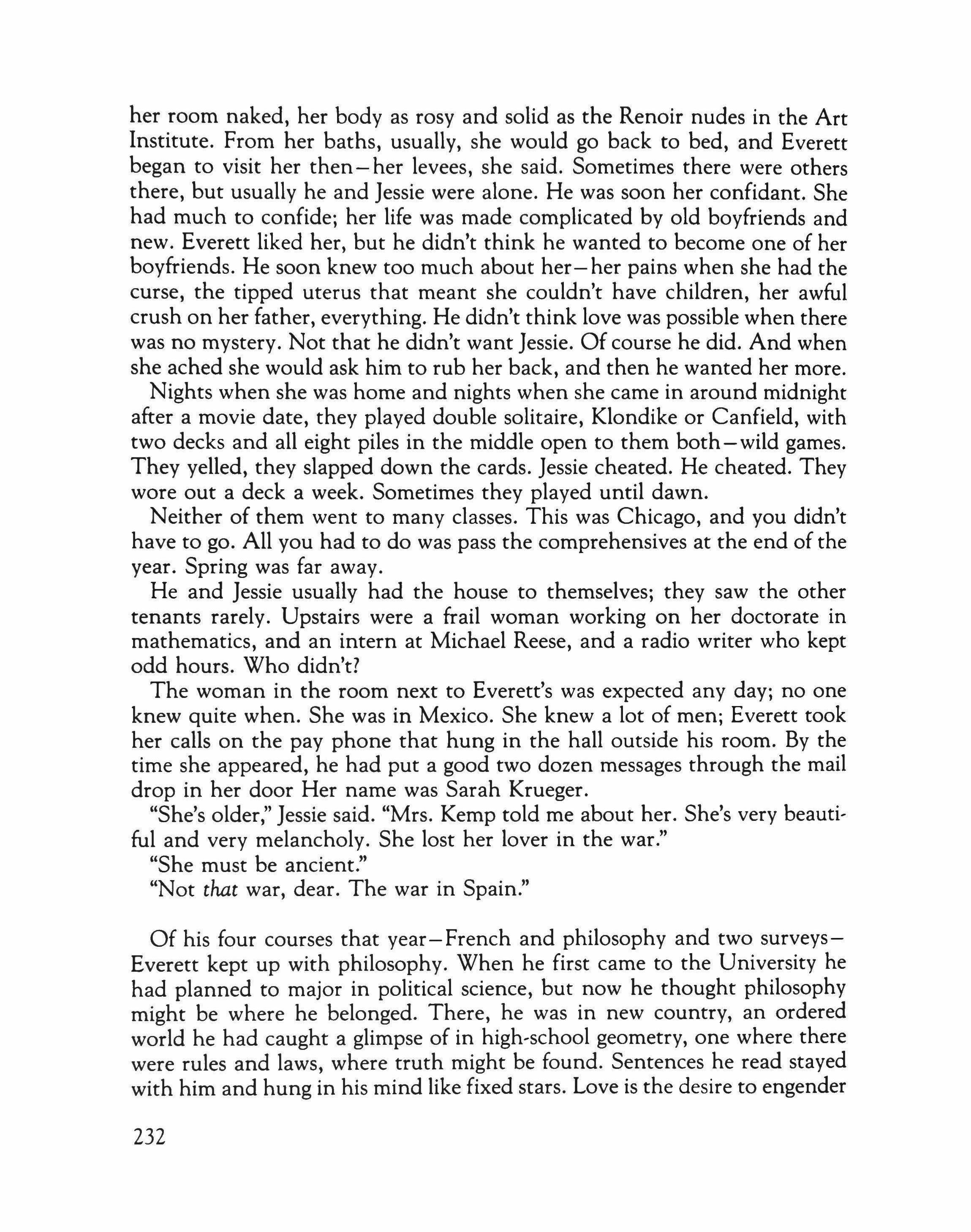
her room naked, her body as rosy and solid as the Renoir nudes in the Art Institute. From her baths, usually, she would go back to bed, and Everett began to visit her then - her levees, she said. Sometimes there were others there, but usually he and Jessie were alone. He was soon her confidant. She had much to confide; her life was made complicated by old boyfriends and new. Everett liked her, but he didn't think he wanted to become one of her boyfriends. He soon knew too much about her-her pains when she had the curse, the tipped uterus that meant she couldn't have children, her awful crush on her father, everything. He didn't think love was possible when there was no mystery. Not that he didn't want Jessie. Of course he did. And when she ached she would ask him to rub her back, and then he wanted her more.
Nights when she was home and nights when she came in around midnight after a movie date, they played double solitaire, Klondike or Canfield, with two decks and all eight piles in the middle open to them both - wild games. They yelled, they slapped down the cards. Jessie cheated. He cheated. They wore out a deck a week. Sometimes they played until dawn.
Neither of them went to many classes. This was Chicago, and you didn't have to go. All you had to do was pass the comprehensives at the end of the year. Spring was far away.
He and Jessie usually had the house to themselves; they saw the other tenants rarely. Upstairs were a frail woman working on her doctorate in mathematics, and an intern at Michael Reese, and a radio writer who kept odd hours. Who didn't?
The woman in the room next to Everett's was expected any day; no one knew quite when. She was in Mexico. She knew a lot of men; Everett took her calls on the pay phone that hung in the hall outside his room. By the time she appeared, he had put a good two dozen messages through the mail drop in her door Her name was Sarah Krueger.
"She's older," Jessie said. "Mrs. Kemp told me about her. She's very beautiful and very melancholy. She lost her lover in the war."
"She must be ancient."
"Not that war, dear. The war in Spain."
Of his four courses that year-French and philosophy and two surveysEverett kept up with philosophy. When he first came to the University he had planned to major in political science, but now he thought philosophy might be where he belonged. There, he was in new country, an ordered world he had caught a glimpse of in high-school geometry, one where there were rules and laws, where truth might be found. Sentences he read stayed with him and hung in his mind like fixed stars. Love is the desire to engender
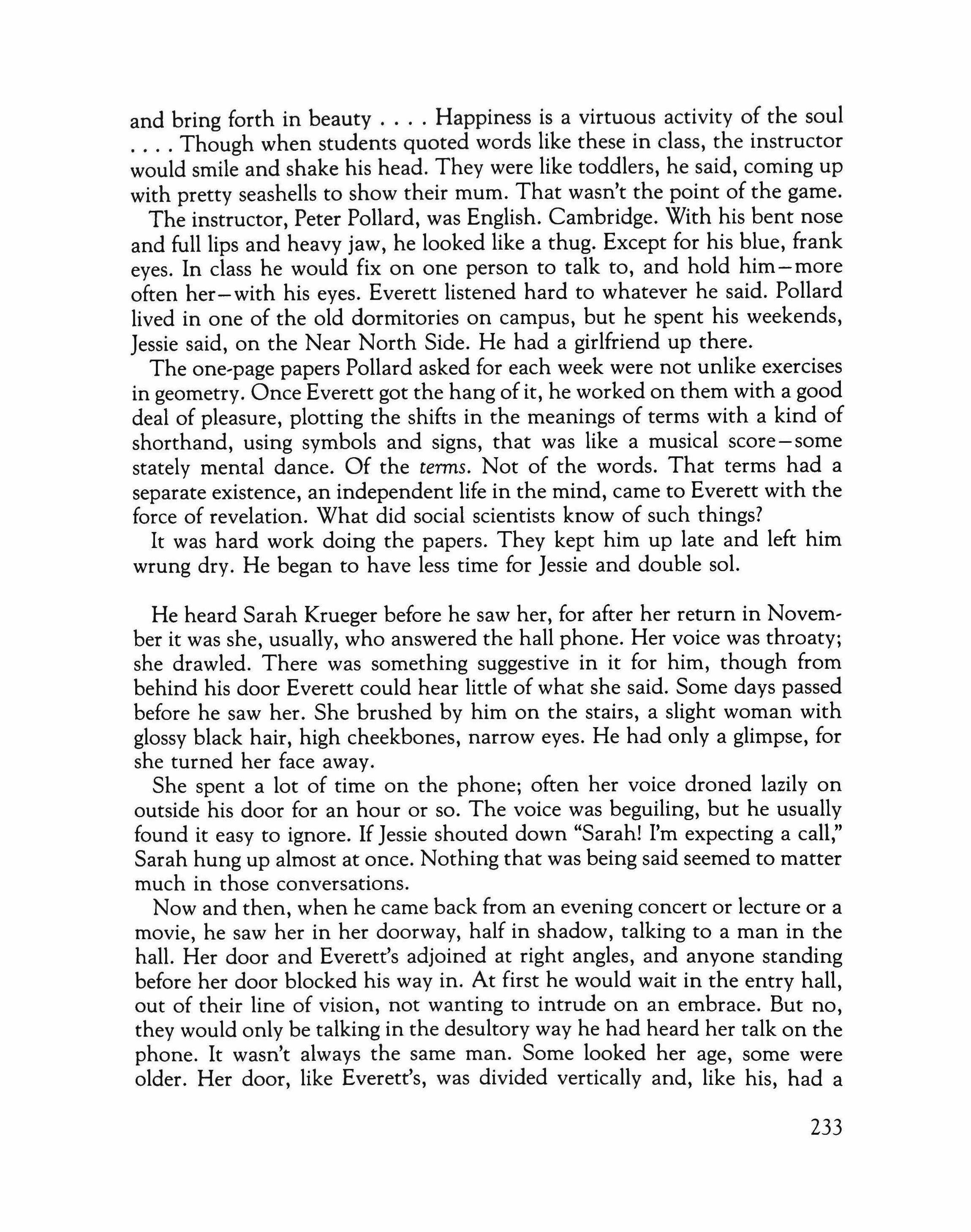
and bring forth in beauty Happiness is a virtuous activity of the soul
Though when students quoted words like these in class, the instructor would smile and shake his head. They were like toddlers, he said, coming up with pretty seashells to show their mum. That wasn't the point of the game.
The instructor, Peter Pollard, was English. Cambridge. With his bent nose and full lips and heavy jaw, he looked like a thug. Except for his blue, frank eyes. In class he would fix on one person to talk to, and hold him - more often her-with his eyes. Everett listened hard to whatever he said. Pollard lived in one of the old dormitories on campus, but he spent his weekends, Jessie said, on the Near North Side. He had a girlfriend up there.
The one-page papers Pollard asked for each week were not unlike exercises in geometry. Once Everett got the hang ofit, he worked on them with a good deal of pleasure, plotting the shifts in the meanings of terms with a kind of shorthand, using symbols and signs, that was like a musical score - some stately mental dance. Of the terms. Not of the words. That terms had a separate existence, an independent life in the mind, came to Everett with the force of revelation. What did social scientists know of such things?
It was hard work doing the papers. They kept him up late and left him wrung dry. He began to have less time for Jessie and double sol.
He heard Sarah Krueger before he saw her, for after her return in Novernber it was she, usually, who answered the hall phone. Her voice was throaty; she drawled. There was something suggestive in it for him, though from behind his door Everett could hear little of what she said. Some days passed before he saw her. She brushed by him on the stairs, a slight woman with glossy black hair, high cheekbones, narrow eyes. He had only a glimpse, for she turned her face away.
She spent a lot of time on the phone; often her voice droned lazily on outside his door for an hour or so. The voice was beguiling, but he usually found it easy to ignore. If Jessie shouted down "Sarah! I'm expecting a call," Sarah hung up almost at once. Nothing that was being said seemed to matter much in those conversations.
Now and then, when he came back from an evening concert or lecture or a movie, he saw her in her doorway, half in shadow, talking to a man in the hall. Her door and Everett's adjoined at right angles, and anyone standing before her door blocked his way in. At first he would wait in the entry hall, out of their line of vision, not wanting to intrude on an embrace. But no, they would only be talking in the desultory way he had heard her talk on the phone. It wasn't always the same man. Some looked her age, some were older. Her door, like Everett's, was divided vertically and, like his, had a
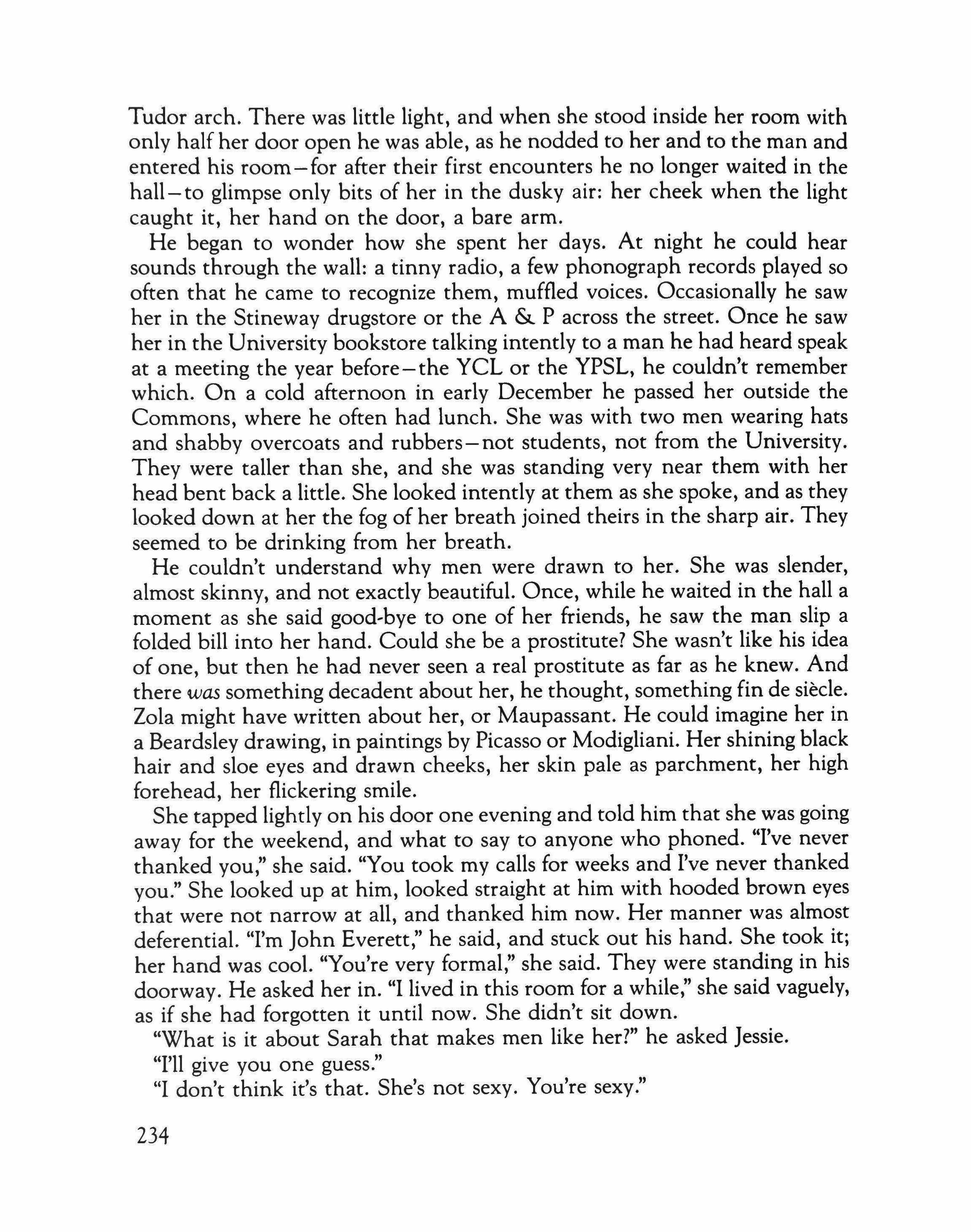
Tudor arch. There was little light, and when she stood inside her room with only half her door open he was able, as he nodded to her and to the man and entered his room-for after their first encounters he no longer waited in the hall- to glimpse only bits of her in the dusky air: her cheek when the light caught it, her hand on the door, a bare arm.
He began to wonder how she spent her days. At night he could hear sounds through the wall: a tinny radio, a few phonograph records played so often that he came to recognize them, muffled voices. Occasionally he saw her in the Stineway drugstore or the A & P across the street. Once he saw her in the University bookstore talking intently to a man he had heard speak at a meeting the year before-the YCL or the YPSL, he couldn't remember which. On a cold afternoon in early December he passed her outside the Commons, where he often had lunch. She was with two men wearing hats and shabby overcoats and rubbers-not students, not from the University. They were taller than she, and she was standing very near them with her head bent back a little. She looked intently at them as she spoke, and as they looked down at her the fog of her breath joined theirs in the sharp air. They seemed to be drinking from her breath.
He couldn't understand why men were drawn to her. She was slender, almost skinny, and not exactly beautiful. Once, while he waited in the hall a moment as she said good-bye to one of her friends, he saw the man slip a folded bill into her hand. Could she be a prostitute? She wasn't like his idea of one, but then he had never seen a real prostitute as far as he knew. And there was something decadent about her, he thought, something fin de siecle. Zola might have written about her, or Maupassant. He could imagine her in a Beardsley drawing, in paintings by Picasso or Modigliani. Her shining black hair and sloe eyes and drawn cheeks, her skin pale as parchment, her high forehead, her flickering smile.
She tapped lightly on his door one evening and told him that she was going away for the weekend, and what to say to anyone who phoned. "I've never thanked you," she said. "You took my calls for weeks and I've never thanked you." She looked up at him, looked straight at him with hooded brown eyes that were not narrow at all, and thanked him now. Her manner was almost deferential. "I'm John Everett," he said, and stuck out his hand. She took it; her hand was cool. "You're very formal," she said. They were standing in his doorway. He asked her in. "I lived in this room for a while," she said vaguely, as if she had forgotten it until now. She didn't sit down.
"What is it about Sarah that makes men like her?" he asked Jessie.
"I'll give you one guess."
"I don't think it's that. She's not sexy. You're sexy."
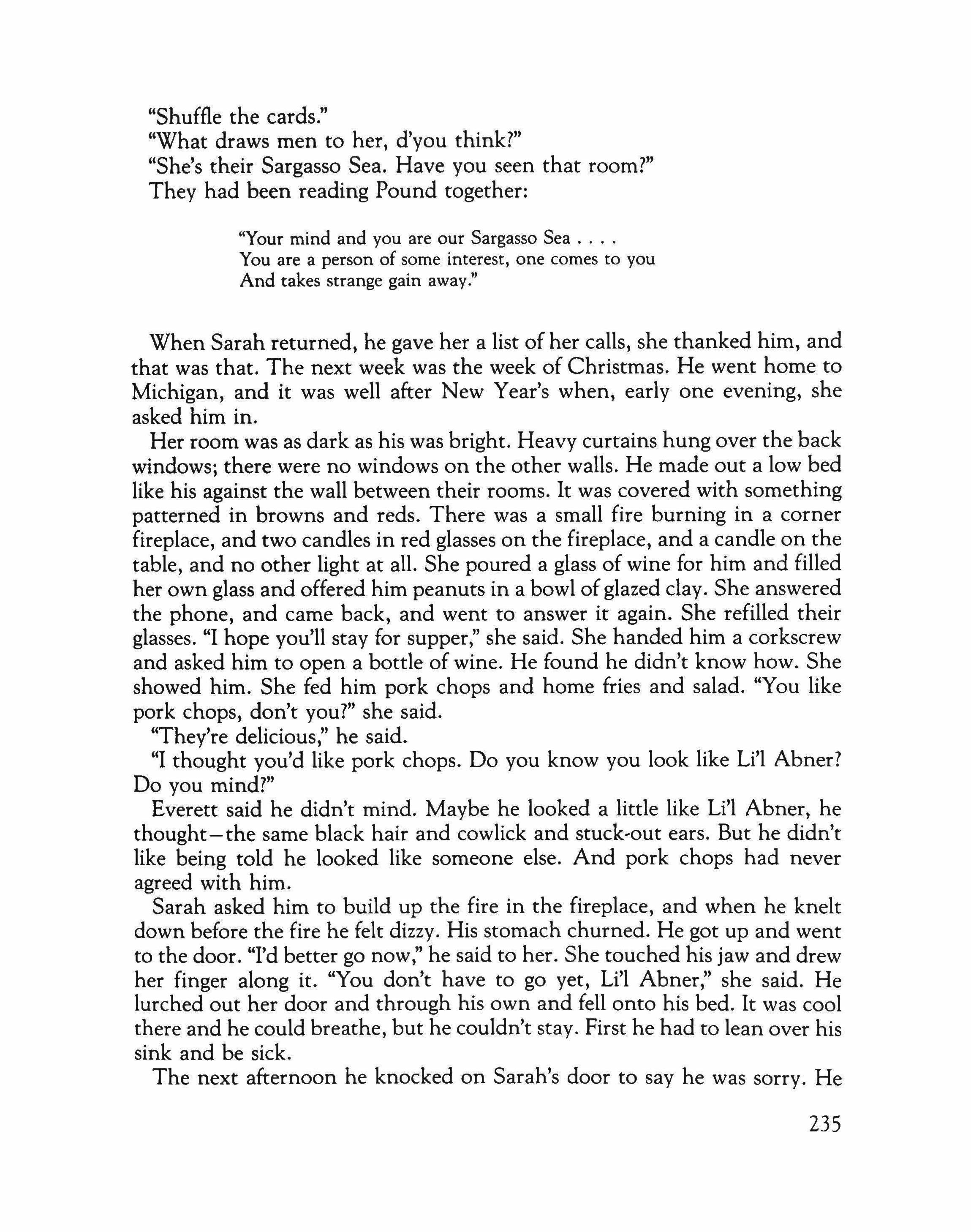
"Shuffle the cards."
"What draws men to her, d'you think?"
"She's their Sargasso Sea. Have you seen that room?" They had been reading Pound together:
"Your mind and you are our Sargasso Sea You are a person of some interest, one comes to you And takes strange gain away."
When Sarah returned, he gave her a list of her calls, she thanked him, and that was that. The next week was the week of Christmas. He went home to Michigan, and it was well after New Year's when, early one evening, she asked him in.
Her room was as dark as his was bright. Heavy curtains hung over the back windows; there were no windows on the other walls. He made out a low bed like his against the wall between their rooms. It was covered with something patterned in browns and reds. There was a small fire burning in a corner fireplace, and two candles in red glasses on the fireplace, and a candle on the table, and no other light at all. She poured a glass of wine for him and filled her own glass and offered him peanuts in a bowl ofglazed clay. She answered the phone, and came back, and went to answer it again. She refilled their glasses. "I hope you'll stay for supper," she said. She handed him a corkscrew and asked him to open a bottle of wine. He found he didn't know how. She showed him. She fed him pork chops and home fries and salad. "You like pork chops, don't you?" she said.
"They're delicious:' he said.
"I thought you'd like pork chops. Do you know you look like Li'l Abner? Do you mind?"
Everett said he didn't mind. Maybe he looked a little like Li'l Abner, he thought-the same black hair and cowlick and stuck-out ears. But he didn't like being told he looked like someone else. And pork chops had never agreed with him.
Sarah asked him to build up the fire in the fireplace, and when he knelt down before the fire he felt dizzy. His stomach churned. He got up and went to the door. "I'd better go now:' he said to her. She touched his jaw and drew her finger along it. "You don't have to go yet, Li'l Abner," she said. He lurched out her door and through his own and fell onto his bed. It was cool there and he could breathe, but he couldn't stay. First he had to lean over his sink and be sick.
The next afternoon he knocked on Sarah's door to say he was sorry. He

would have to come again, she said. "All right," he said, certain that she was only being polite. "Would Saturday night be good?" she said.
There was chicken on Saturday, and chilled wine that Sarah ordered from the liquor store. Everett paid, and that made him feel better. The wine was Chablis; it didn't bother him at all. Tonight the table had a woven cloth and a brass candlestick on it. The fire crackled in the fireplace behind them. He told Sarah about his family, and about what he was studying. She asked him to. He wanted to ask her questions, too, but he stammered so badly over words like "Why" and "Do" and "What" that he couldn't start. And he was wearing his tweed jacket; he was hot. Sarah was wearing the brown sweater and skirt she usually wore. He had never known a woman who cared so little for clothes. Though she was neat. No runs in her stockings, ever, and her hair was always brushed and clean. She took long baths, like Jessie.
"You look warm," she said to him.
"I am. May I take off this jacket?"
"Sure. Take off your tie."
They sat on her bed after supper. There was no place else to sit but the chairs they had been sitting in. They listened to her records and drank sweet black coffee out of little Mexican cups that tasted of clay. Every few minutes she got up to change the records, and when she came back they would be closer together. Finally when she came back he kissed her. "Urn," she said. He kissed her again. "Well!" she said. "I certainly hope you don't think I asked you over for this." "Hush," he said, and kissed her again, hard this time but not using his tongue. She laughed gently. She put her hands on his shoulders and told him he had nice shoulders. She told him he was a handsome young man; he had never thought himself handsome. He put his hands on her shoulders, then began to take out the hairpins at the nape of her neck. Her hair fell nearly to her waist. "A woman's glory," she said, smiling a sort of crooked smile. He put his hands on her shoulders again and pressed her down to the bed, thinking that she would soon tell him to go, but when he kissed her she held him hard.
"I suppose you'll want to stay all night next," she said.
He didn't say anything to that.
"Do you have a whatzis?" she said. "Sure," he said. "In my wallet."
"Two."
"I've got more in my room."
"Two together," she said. "And a rubber band. I have to be very careful."
He went back to his room and did everything she told him to do. He filled each condom with water, dried it with a towel, then inspected it for leaks. He
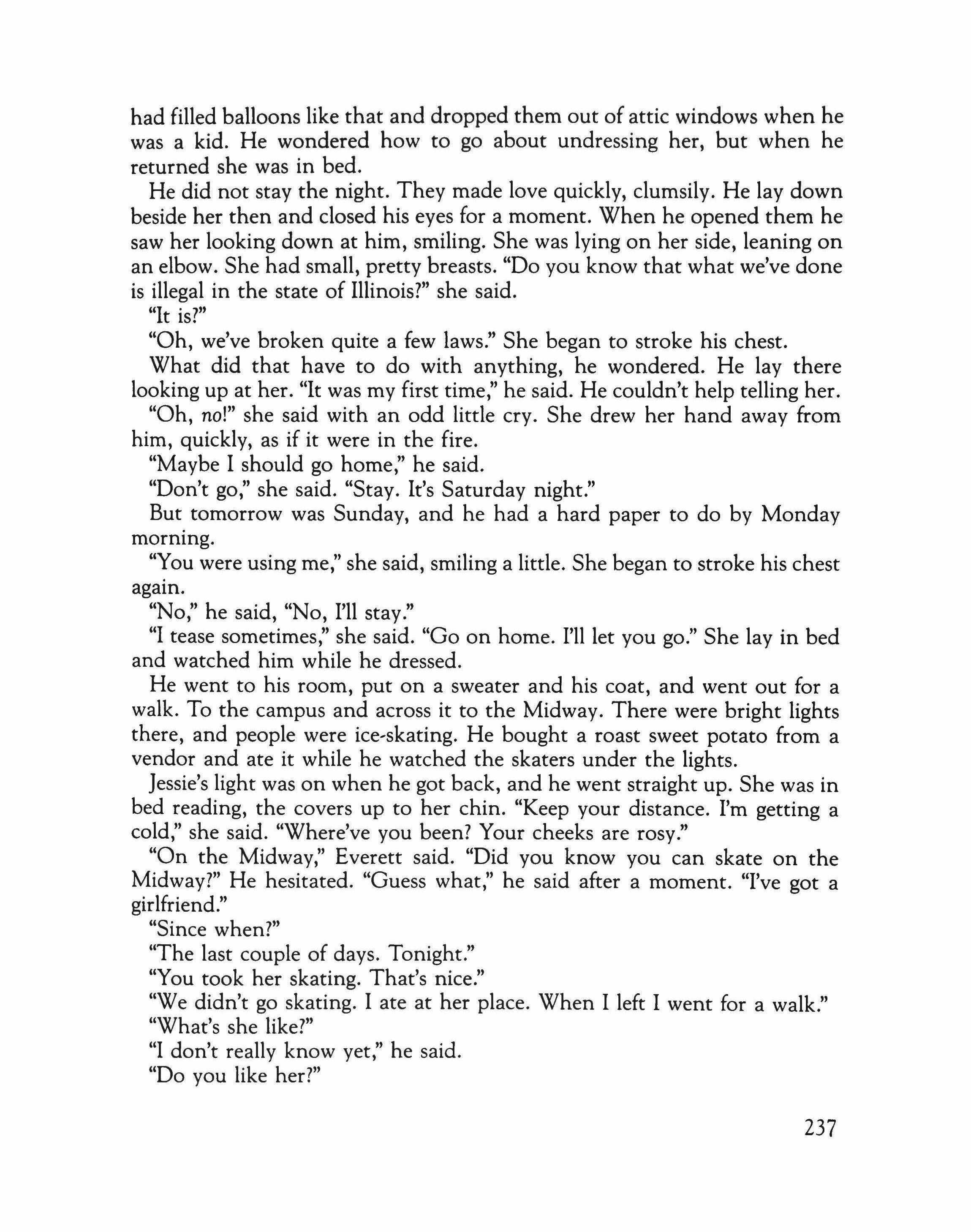
had filled balloons like that and dropped them out of attic windows when he was a kid. He wondered how to go about undressing her, but when he returned she was in bed.
He did not stay the night. They made love quickly, clumsily. He lay down beside her then and closed his eyes for a moment. When he opened them he saw her looking down at him, smiling. She was lying on her side, leaning on an elbow. She had small, pretty breasts. "Do you know that what we've done is illegal in the state of Illinois?" she said.
"It is?"
"Oh, we've broken quite a few laws." She began to stroke his chest.
What did that have to do with anything, he wondered. He lay there looking up at her. "It was my first time," he said. He couldn't help telling her.
"Oh, no!" she said with an odd little cry. She drew her hand away from him, quickly, as if it were in the fire.
"Maybe I should go home," he said.
"Don't go," she said. "Stay. It's Saturday night."
But tomorrow was Sunday, and he had a hard paper to do by Monday morning.
"You were using me," she said, smiling a little. She began to stroke his chest again.
"No," he said, "No, I'll stay."
"I tease sometimes:' she said. "Go on home. I'll let you go." She lay in bed and watched him while he dressed.
He went to his room, put on a sweater and his coat, and went out for a walk. To the campus and across it to the Midway. There were bright lights there, and people were ice-skating. He bought a roast sweet potato from a vendor and ate it while he watched the skaters under the lights.
Jessie's light was on when he got back, and he went straight up. She was in bed reading, the covers up to her chin. "Keep your distance. I'm getting a cold," she said. "Where've you been? Your cheeks are rosy."
"On the Midway," Everett said. "Did you know you can skate on the Midway?" He hesitated. "Guess what," he said after a moment. "I've got a girlfriend."
"Since when?"
"The last couple of days. Tonight."
"You took her skating. That's nice."
"We didn't go skating. I ate at her place. When I left I went for a walk."
"What's she like?"
"I don't really know yet:' he said.
"Do you like her?"
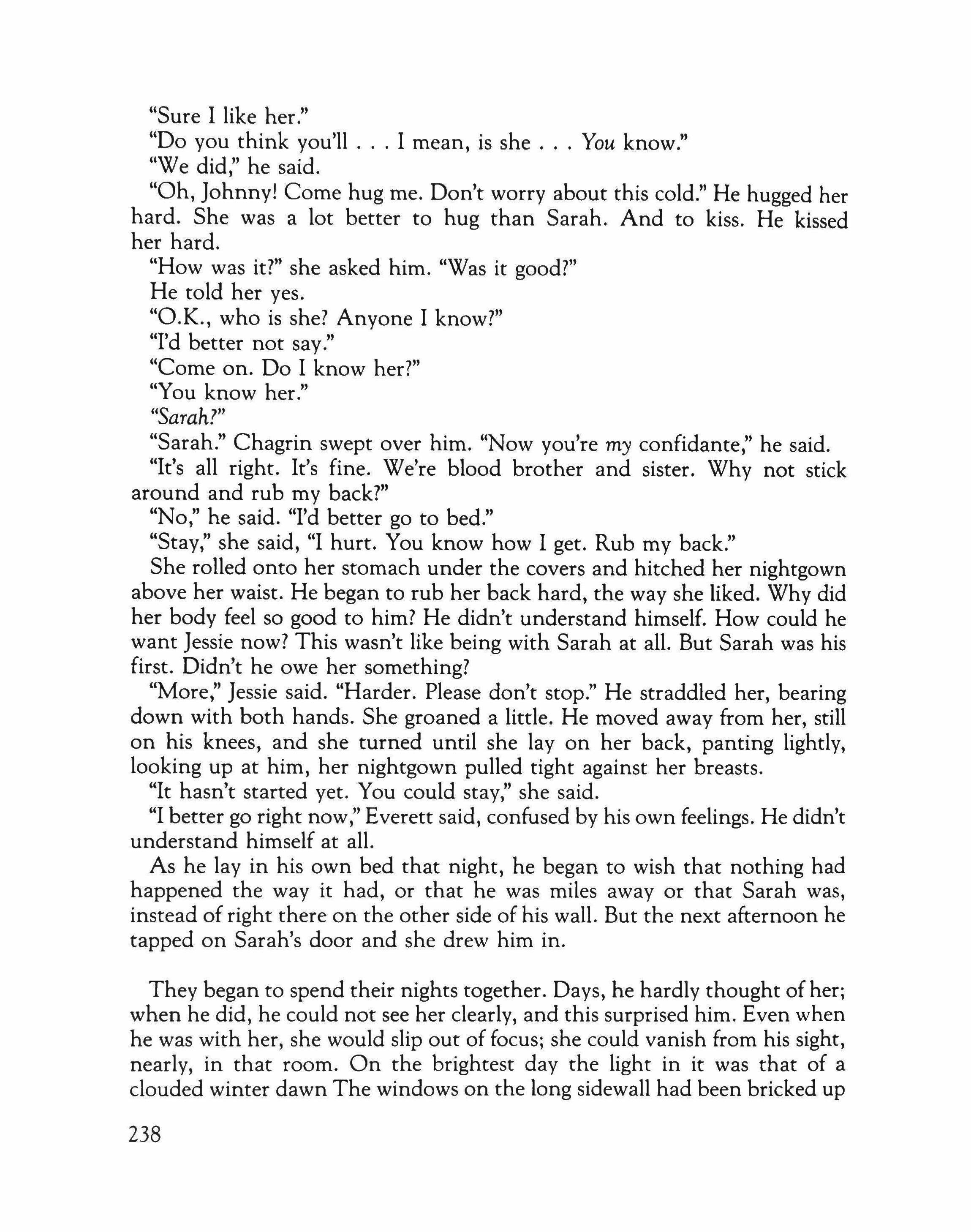
"Sure I like her."
"Do you think you'll I mean, is she You know."
"We did," he said.
"Oh, Johnny! Come hug me. Don't worry about this cold." He hugged her hard. She was a lot better to hug than Sarah. And to kiss. He kissed her hard.
"How was it?" she asked him. "Was it good?"
He told her yes.
"O.K., who is she? Anyone I know?"
"I'd better not say."
"Come on. Do I know her?"
"You know her."
"Sarah?"
"Sarah." Chagrin swept over him. "Now you're my confidante," he said.
"It's all right. It's fine. We're blood brother and sister. Why not stick around and rub my back?"
"No," he said. "I'd better go to bed."
"Stay," she said, "I hurt. You know how I get. Rub my back."
She rolled onto her stomach under the covers and hitched her nightgown above her waist. He began to rub her back hard, the way she liked. Why did her body feel so good to him? He didn't understand himself. How could he want Jessie now? This wasn't like being with Sarah at all. But Sarah was his first. Didn't he owe her something?
"More," Jessie said. "Harder. Please don't stop." He straddled her, bearing down with both hands. She groaned a little. He moved away from her, still on his knees, and she turned until she lay on her back, panting lightly, looking up at him, her nightgown pulled tight against her breasts.
"It hasn't started yet. You could stay," she said.
"I better go right now," Everett said, confused by his own feelings. He didn't understand himself at all.
As he lay in his own bed that night, he began to wish that nothing had happened the way it had, or that he was miles away or that Sarah was, instead of right there on the other side of his wall. But the next afternoon he tapped on Sarah's door and she drew him in.
They began to spend their nights together. Days, he hardly thought of her; when he did, he could not see her clearly, and this surprised him. Even when he was with her, she would slip out of focus; she could vanish from his sight, nearly, in that room. On the brightest day the light in it was that of a clouded winter dawn The windows on the long sidewall had been bricked up
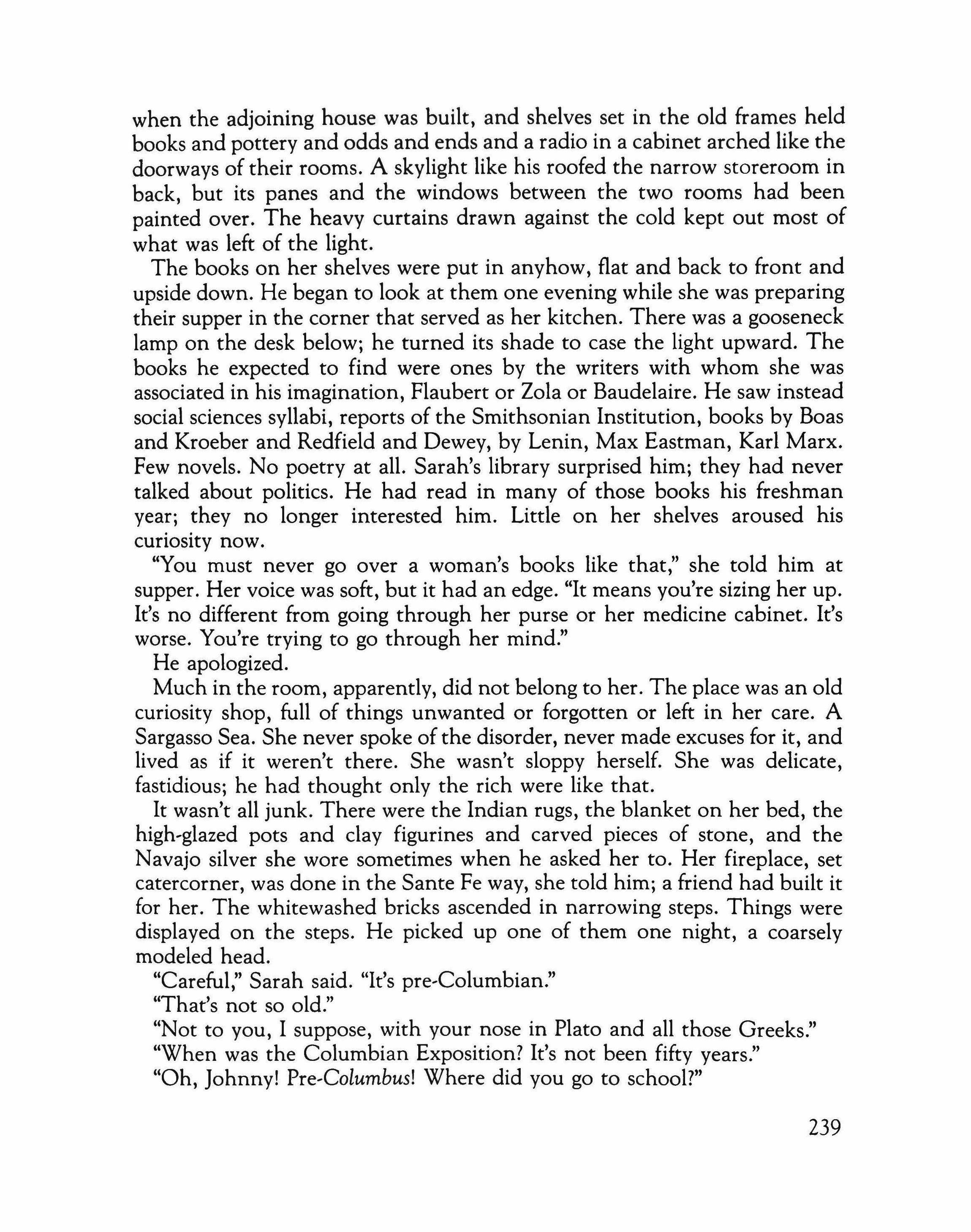
when the adjoining house was built, and shelves set in the old frames held books and pottery and odds and ends and a radio in a cabinet arched like the doorways of their rooms. A skylight like his roofed the narrow storeroom in back, but its panes and the windows between the two rooms had been painted over. The heavy curtains drawn against the cold kept out most of what was left of the light.
The books on her shelves were put in anyhow, flat and back to front and upside down. He began to look at them one evening while she was preparing their supper in the corner that served as her kitchen. There was a gooseneck lamp on the desk below; he turned its shade to case the light upward. The books he expected to find were ones by the writers with whom she was associated in his imagination, Flaubert or Zola or Baudelaire. He saw instead social sciences syllabi, reports of the Smithsonian Institution, books by Boas and Kroeber and Redfield and Dewey, by Lenin, Max Eastman, Karl Marx. Few novels. No poetry at all. Sarah's library surprised him; they had never talked about politics. He had read in many of those books his freshman year; they no longer interested him. Little on her shelves aroused his curiosity now.
"You must never go over a woman's books like that," she told him at supper. Her voice was soft, but it had an edge. "It means you're sizing her up. It's no different from going through her purse or her medicine cabinet. It's worse. You're trying to go through her mind."
He apologized.
Much in the room, apparently, did not belong to her. The place was an old curiosity shop, full of things unwanted or forgotten or left in her care. A Sargasso Sea. She never spoke of the disorder, never made excuses for it, and lived as if it weren't there. She wasn't sloppy herself. She was delicate, fastidious; he had thought only the rich were like that.
It wasn't all junk. There were the Indian rugs, the blanket on her bed, the high-glazed pots and clay figurines and carved pieces of stone, and the Navajo silver she wore sometimes when he asked her to. Her fireplace, set catercorner, was done in the Sante Fe way, she told him; a friend had built it for her. The whitewashed bricks ascended in narrowing steps. Things were displayed on the steps. He picked up one of them one night, a coarsely modeled head.
"Careful," Sarah said. "It's pre-Columbian," "That's not so old."
"Not to you, I suppose, with your nose in Plato and all those Greeks." "When was the Columbian Exposition? It's not been fifty years."
"Oh, Johnny! Pre-Coiumbusl Where did you go to school?"
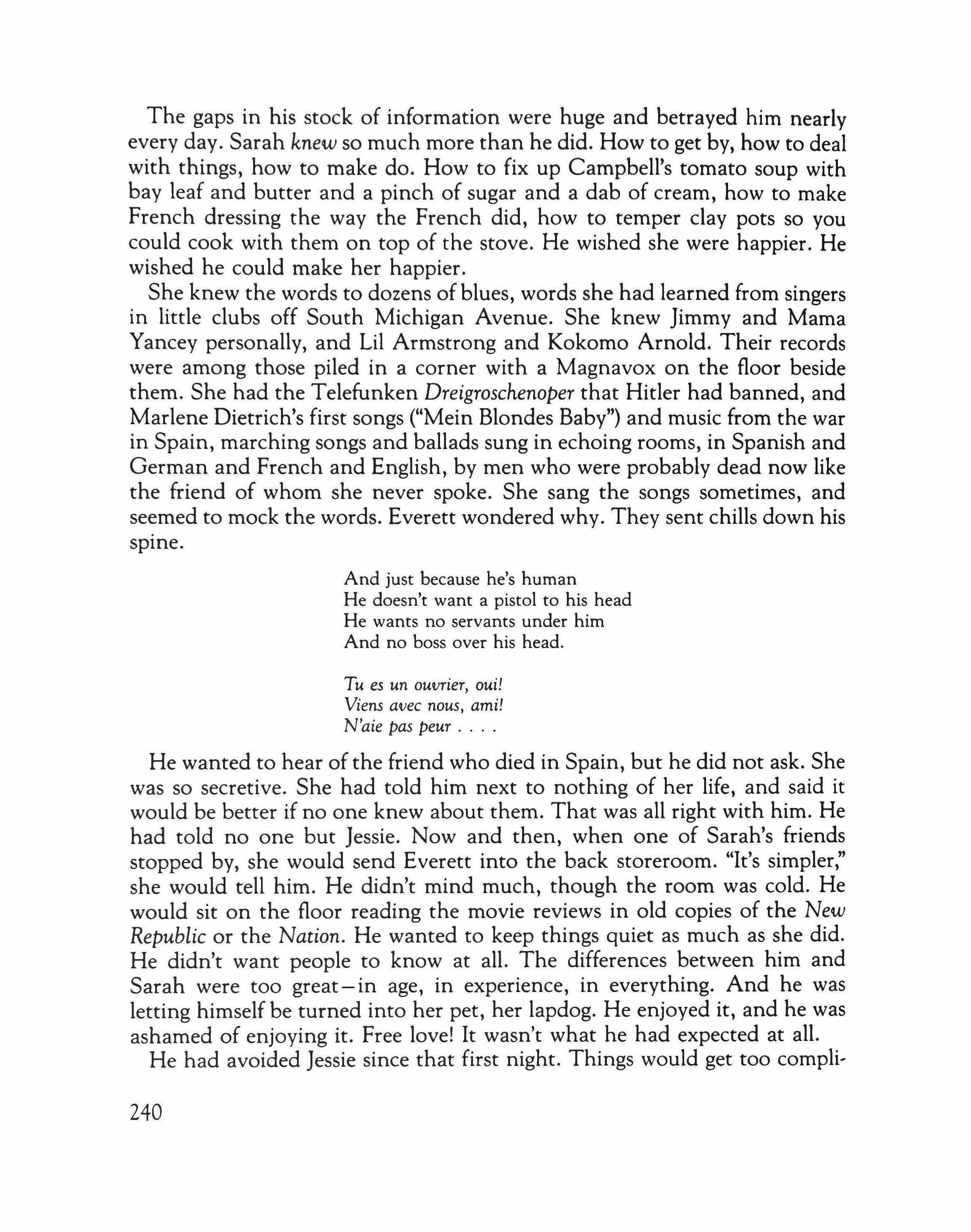
The gaps in his stock of information were huge and betrayed him nearly every day. Sarah knew so much more than he did. How to get by, how to deal with things, how to make do. How to fix up Campbell's tomato soup with bay leaf and butter and a pinch of sugar and a dab of cream, how to make French dressing the way the French did, how to temper clay pots so you could cook with them on top of the stove. He wished she were happier. He wished he could make her happier.
She knew the words to dozens ofblues, words she had learned from singers in little clubs off South Michigan Avenue. She knew Jimmy and Mama Yancey personally, and Lil Armstrong and Kokomo Arnold. Their records were among those piled in a corner with a Magnavox on the floor beside them. She had the Telefunken Dreigroschenoper that Hitler had banned, and Marlene Dietrich's first songs ("Mein Blondes Baby") and music from the war in Spain, marching songs and ballads sung in echoing rooms, in Spanish and German and French and English, by men who were probably dead now like the friend of whom she never spoke. She sang the songs sometimes, and seemed to mock the words. Everett wondered why. They sent chills down his spine.
And just because he's human
He doesn't want a pistol to his head He wants no servants under him And no boss over his head.
Tu es un ouvrier, oui!
Viens avec nous, ami!
N'aie pas peur
He wanted to hear of the friend who died in Spain, but he did not ask. She was so secretive. She had told him next to nothing of her life, and said it would be better if no one knew about them. That was all right with him. He had told no one but Jessie. Now and then, when one of Sarah's friends stopped by, she would send Everett into the back storeroom. "It's simpler," she would tell him. He didn't mind much, though the room was cold. He would sit on the floor reading the movie reviews in old copies of the New Republic or the Nation. He wanted to keep things quiet as much as she did. He didn't want people to know at all. The differences between him and Sarah were too great - in age, in experience, in everything. And he was letting himself be turned into her pet, her lapdog. He enjoyed it, and he was ashamed of enjoying it. Free love! It wasn't what he had expected at all.
He had avoided Jessie since that first night. Things would get too cornpli-

cated, and there was too much he couldn't explain. Besides, living was easy with Sarah, and he was learning a lot. She was amazed, or pretended to be, at how little he knew of the world. You've never heard mariachis before? You don't know who Chagall is? Vardis Fisher? Martha Graham? Merle Armitage? Cripple Clarence Lofton? Georgia O'Keefe? Garda Lorca? Cioppino? Potlatch?
Was it a vegetable dish?
"This is potlatch:' she said, and took a heavy overcoat from her closet. "It's yours:' she said. "Wear it in good health." The coat hung nearly to his ankles, and his hands disappeared in the sleeves. "Every time you've come in this week you've been like ice," she said. He had been. This was the coldest February in thirty years, and his overcoat was light. "It doesn't fit me:' he said.
"That's no way to accept a gift," she told him. He took it; the coat was thick and warm. She explained the potlatch ceremony to him. But what could he give her in return? He went to his room to hang up the coat. Nothing he had was good enough or anything she'd want. The radio? He brought it back to her, its cord and antenna wire dangling. "Potlatch?" he said. She was really pleased. The radio she had was on its last legs. But his stomach hurt. How he had wanted that radio the year before! It was the first time in his life anyone had offered him credit, and he had walked to the radio store on Sixty-third Street every Saturday morning for twenty-five weeks until the final install, ment was paid.
He asked Sarah whose coat it was.
"You're always so curious," she said. "A friend's."
"The one who died?"
"I thought you must know about him."
"That's all I know," he told her. "Someone said he was killed in Spain."
"Anybody around here can tell you about him," she said. "I would have told you one of these days."
He didn't ask any more questions, though later that evening he asked her what she did with her days. He was curious about that.
"You mean how do I make my living?" she said dryly. "I work now and then."
No, that wasn't what he meant. But what was she doing at the University? He saw her over there sometimes.
She was in the anthropology department, she told him. Didn't he know that? She sat in on a couple of courses. She was working on her master's, though it would be some time before she got her degree. Before Chicago,
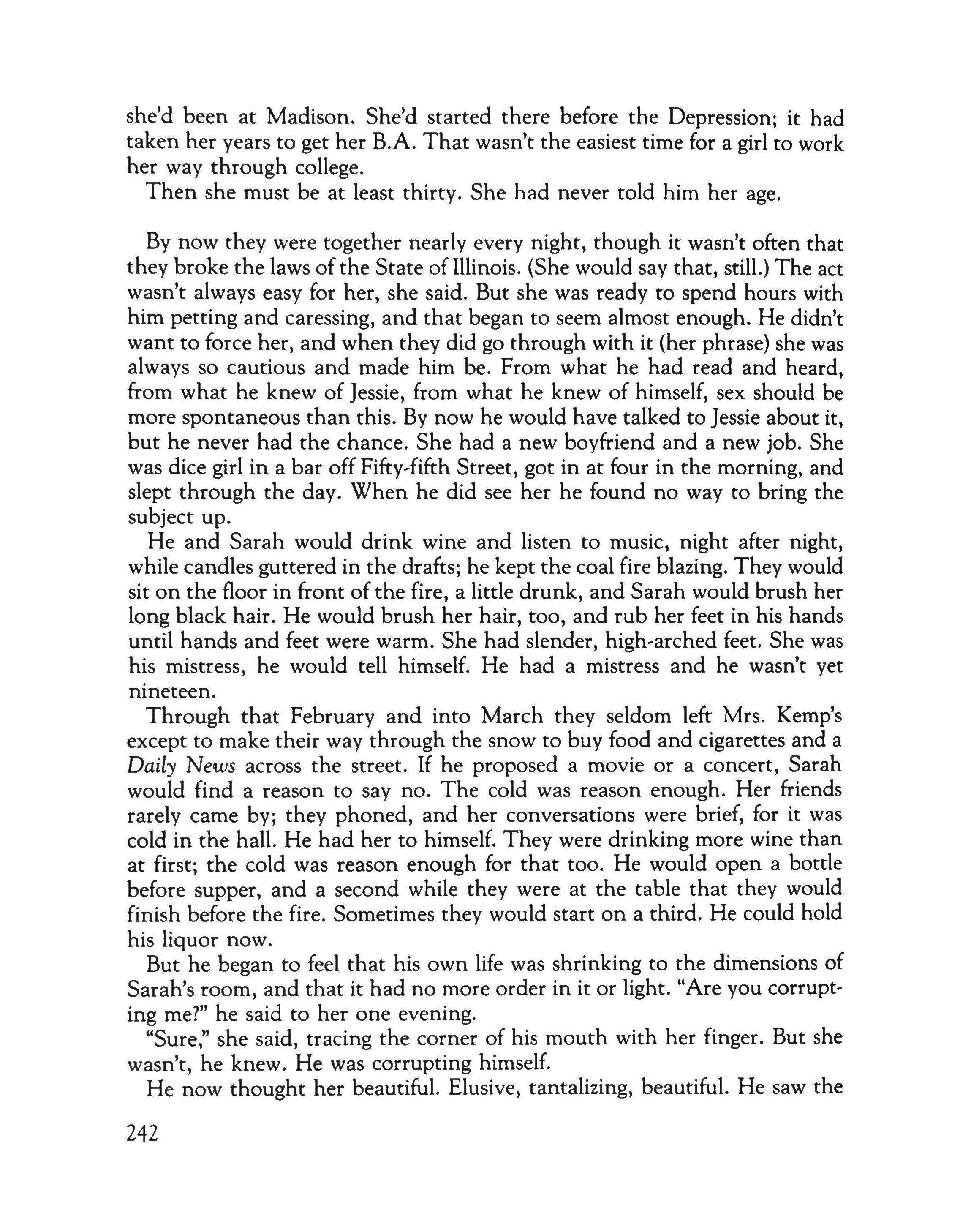
she'd been at Madison. She'd started there before the Depression; it had taken her years to get her B.A. That wasn't the easiest time for a girl to work her way through college.
Then she must be at least thirty. She had never told him her age.
By now they were together nearly every night, though it wasn't often that they broke the laws of the State of Illinois. (She would say that, still.) The act wasn't always easy for her, she said. But she was ready to spend hours with him petting and caressing, and that began to seem almost enough. He didn't want to force her, and when they did go through with it (her phrase) she was always so cautious and made him be. From what he had read and heard, from what he knew of Jessie, from what he knew of himself, sex should be more spontaneous than this. By now he would have talked to Jessie about it, but he never had the chance. She had a new boyfriend and a new job. She was dice girl in a bar off Fifrv-fifrh Street, got in at four in the morning, and slept through the day. When he did see her he found no way to bring the subject up.
He and Sarah would drink wine and listen to music, night after night, while candles guttered in the drafts; he kept the coal fire blazing. They would sit on the floor in front of the fire, a little drunk, and Sarah would brush her long black hair. He would brush her hair, too, and rub her feet in his hands until hands and feet were warm. She had slender, high-arched feet. She was his mistress, he would tell himself. He had a mistress and he wasn't yet nineteen.
Through that February and into March they seldom left Mrs. Kemp's except to make their way through the snow to buy food and cigarettes and a Daily News across the street. If he proposed a movie or a concert, Sarah would find a reason to say no. The cold was reason enough. Her friends rarely came by; they phoned, and her conversations were brief, for it was cold in the hall. He had her to himself. They were drinking more wine than at first; the cold was reason enough for that too. He would open a bottle before supper, and a second while they were at the table that they would finish before the fire. Sometimes they would start on a third. He could hold his liquor now.
But he began to feel that his own life was shrinking to the dimensions of Sarah's room, and that it had no more order in it or light. "Are you corrupting me?" he said to her one evening.
"Sure," she said, tracing the corner of his mouth with her finger. But she wasn't, he knew. He was corrupting himself.
He now thought her beautiful. Elusive, tantalizing, beautiful. He saw the

sadness in her, and it moved him. When he asked her why she was sad, knowing already that such a question must have no answer, she would smile and say nothing. Was it the man dead in Spain? He felt it was more than that. His lady of sorrows, he called her to himself. His melancholy baby. Now when he was away from her-usually no farther than his room next door-he could see her clearly in his mind, shining with a faint radiance in that dusky room. He had hoped when he was a child that he would know a really beautiful woman someday, and that he would be in love with her and she with him. And yet he did not think that he was in love with Sarah. He had longed once, too, to be wise - not to be learned, but to be wise. He tried to tell Sarah one evening what he meant. The longing for wisdom wasn't like intellectual curiosity, he told her; curiosity was the corruption of man's desire to know. It was like the difference between love and just sex.
"You're good, Johnny, aren't you?" she said to him. "You really are." Her voice and eyes were kind. He didn't want her to be kind; kindness from women suffocated him.
"I'm not:' he said.
The snow began to melt, and he began to spend his days on campus. One afternoon he saw Sarah in the University bookstore looking at the books on the bargain table. "I have to find a present," she said vaguely. "It's not important." She was waiting for someone, he thought, but she left when he did. They walked over to the classics library to pick up his books and then back toward Mrs. Kemp's. On the way they passed the chapel, where carved Gothic letters on the wall of the apse proclaimed "Ye shall know the truth, and the truth shall make you free."
"That's a lot of malarkey," she said. "The truth won't take you far. You've got to fight."
He had never before heard her express an opinion with any force. Then she laughed abruptly. "Do you know what we used to say when I first came to Chicago? 'Ye shall know the douche, and the douche shall make you free.' And that's a lot of malarkey."
She told him that night of her abortion the year before, on a kitchen table without anesthesia. "A man can never know what that's like," she said. It wasn't the pain, she said. Or not only the pain. It was the loss. It was being absolutely conscious as her womb was scraped of both pain and loss. It made the loss intolerable. She spoke the words evenly and flatly, looking straight at him. "No one should ever be made to suffer like that," she said. He couldn't return her look. She took his hand. "You surprise me," she said. "I thought I would never want a man again."
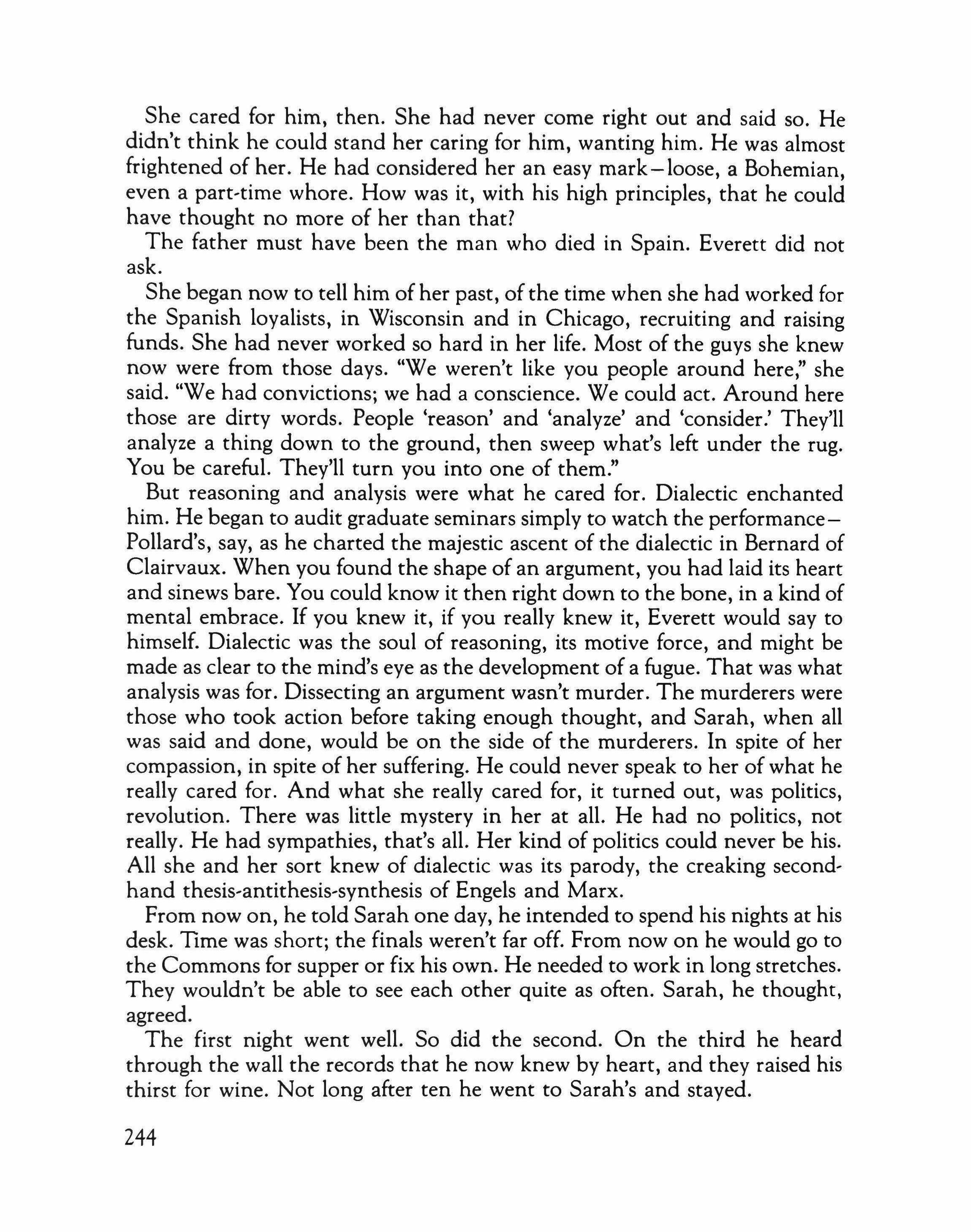
She cared for him, then. She had never come right out and said so. He didn't think he could stand her caring for him, wanting him. He was almost frightened of her. He had considered her an easy mark-loose, a Bohemian, even a part-time whore. How was it, with his high principles, that he could have thought no more of her than that?
The father must have been the man who died in Spain. Everett did not ask.
She began now to tell him of her past, ofthe time when she had worked for the Spanish loyalists, in Wisconsin and in Chicago, recruiting and raising funds. She had never worked so hard in her life. Most of the guys she knew now were from those days. "We weren't like you people around here:' she said. "We had convictions; we had a conscience. We could act. Around here those are dirty words. People 'reason' and 'analyze' and 'consider.' They'll analyze a thing down to the ground, then sweep what's left under the rug. You be careful. They'll turn you into one of them."
But reasoning and analysis were what he cared for. Dialectic enchanted him. He began to audit graduate seminars simply to watch the performancePollard's, say, as he charted the majestic ascent of the dialectic in Bernard of Clairvaux. When you found the shape of an argument, you had laid its heart and sinews bare. You could know it then right down to the bone, in a kind of mental embrace. If you knew it, if you really knew it, Everett would say to himself. Dialectic was the soul of reasoning, its motive force, and might be made as clear to the mind's eye as the development of a fugue. That was what analysis was for. Dissecting an argument wasn't murder. The murderers were those who took action before taking enough thought, and Sarah, when all was said and done, would be on the side of the murderers. In spite of her compassion, in spite of her suffering. He could never speak to her of what he really cared for. And what she really cared for, it turned out, was politics, revolution. There was little mystery in her at all. He had no politics, not really. He had sympathies, that's all. Her kind of politics could never be his. All she and her sort knew of dialectic was its parody, the creaking second, hand thesis-antithesis-svnrhesis of Engels and Marx.
From now on, he told Sarah one day, he intended to spend his nights at his desk. Time was short; the finals weren't far off. From now on he would go to the Commons for supper or fix his own. He needed to work in long stretches. They wouldn't be able to see each other quite as often. Sarah, he thought, agreed.
The first night went well. So did the second. On the third he heard through the wall the records that he now knew by heart, and they raised his thirst for wine. Not long after ten he went to Sarah's and stayed.
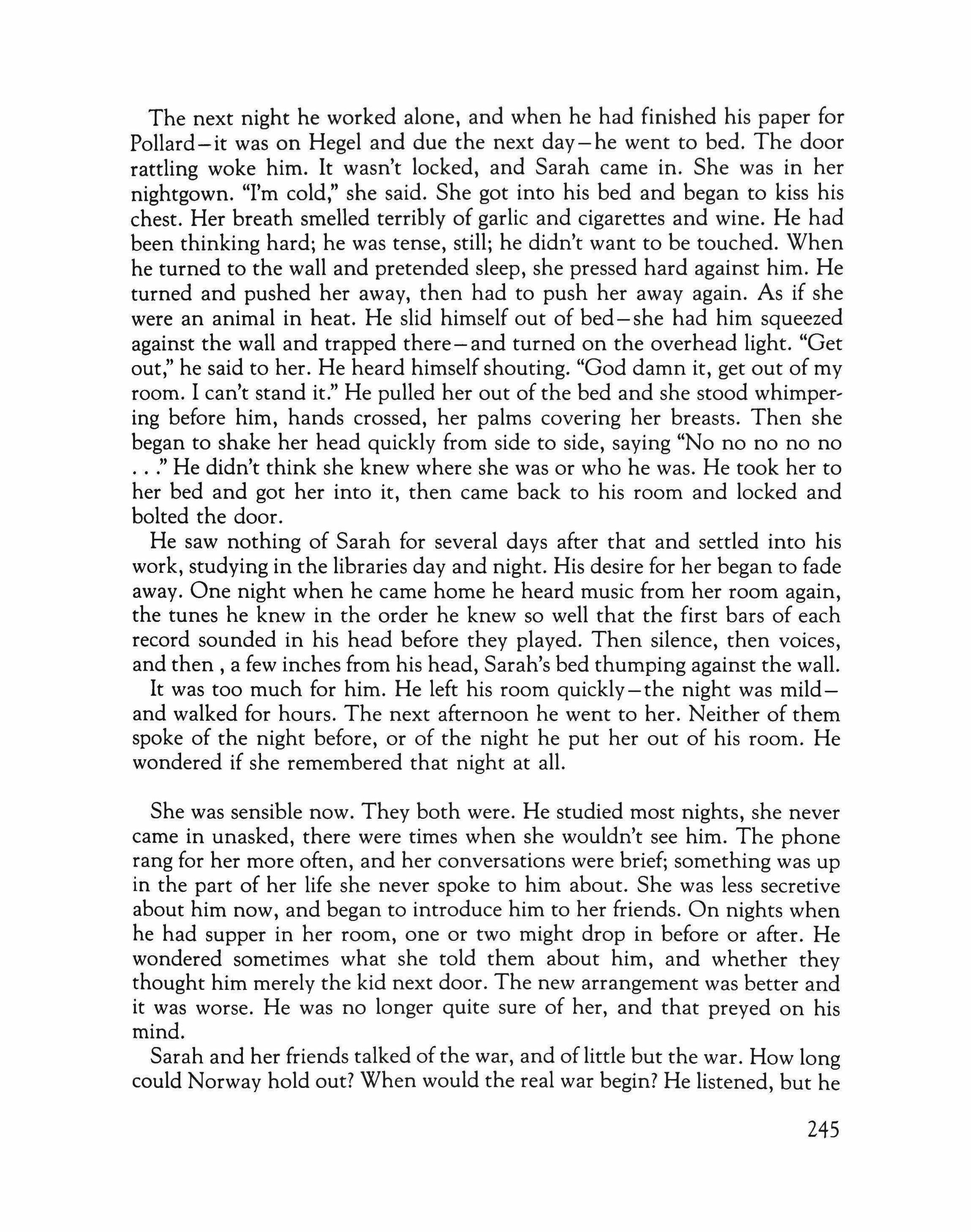
The next night he worked alone, and when he had finished his paper for Pollard-it was on Hegel and due the next day-he went to bed. The door rattling woke him. It wasn't locked, and Sarah came in. She was in her nightgown. "I'm cold," she said. She got into his bed and began to kiss his chest. Her breath smelled terribly of garlic and cigarettes and wine. He had been thinking hard; he was tense, still; he didn't want to be touched. When he turned to the wall and pretended sleep, she pressed hard against him. He turned and pushed her away, then had to push her away again. As if she were an animal in heat. He slid himself out of bed - she had him squeezed against the wall and trapped there- and turned on the overhead light. "Get out," he said to her. He heard himself shouting. "God damn it, get out of my room. I can't stand it." He pulled her out of the bed and she stood whimper, ing before him, hands crossed, her palms covering her breasts. Then she began to shake her head quickly from side to side, saying "No no no no no
He didn't think she knew where she was or who he was. He took her to her bed and got her into it, then came back to his room and locked and bolted the door.
He saw nothing of Sarah for several days after that and settled into his work, studying in the libraries day and night. His desire for her began to fade away. One night when he came home he heard music from her room again, the tunes he knew in the order he knew so well that the first bars of each record sounded in his head before they played. Then silence, then voices, and then, a few inches from his head, Sarah's bed thumping against the wall.
It was too much for him. He left his room quickly-the night was mildand walked for hours. The next afternoon he went to her. Neither of them spoke of the night before, or of the night he put her out of his room. He wondered if she remembered that night at all.
She was sensible now. They both were. He studied most nights, she never came in unasked, there were times when she wouldn't see him. The phone rang for her more often, and her conversations were brief; something was up in the part of her life she never spoke to him about. She was less secretive about him now, and began to introduce him to her friends. On nights when he had supper in her room, one or two might drop in before or after. He wondered sometimes what she told them about him, and whether they thought him merely the kid next door. The new arrangement was better and it was worse. He was no longer quite sure of her, and that preyed on his mind.
Sarah and her friends talked of the war, and of little but the war. How long could Norway hold out? When would the real war begin? He listened, but he
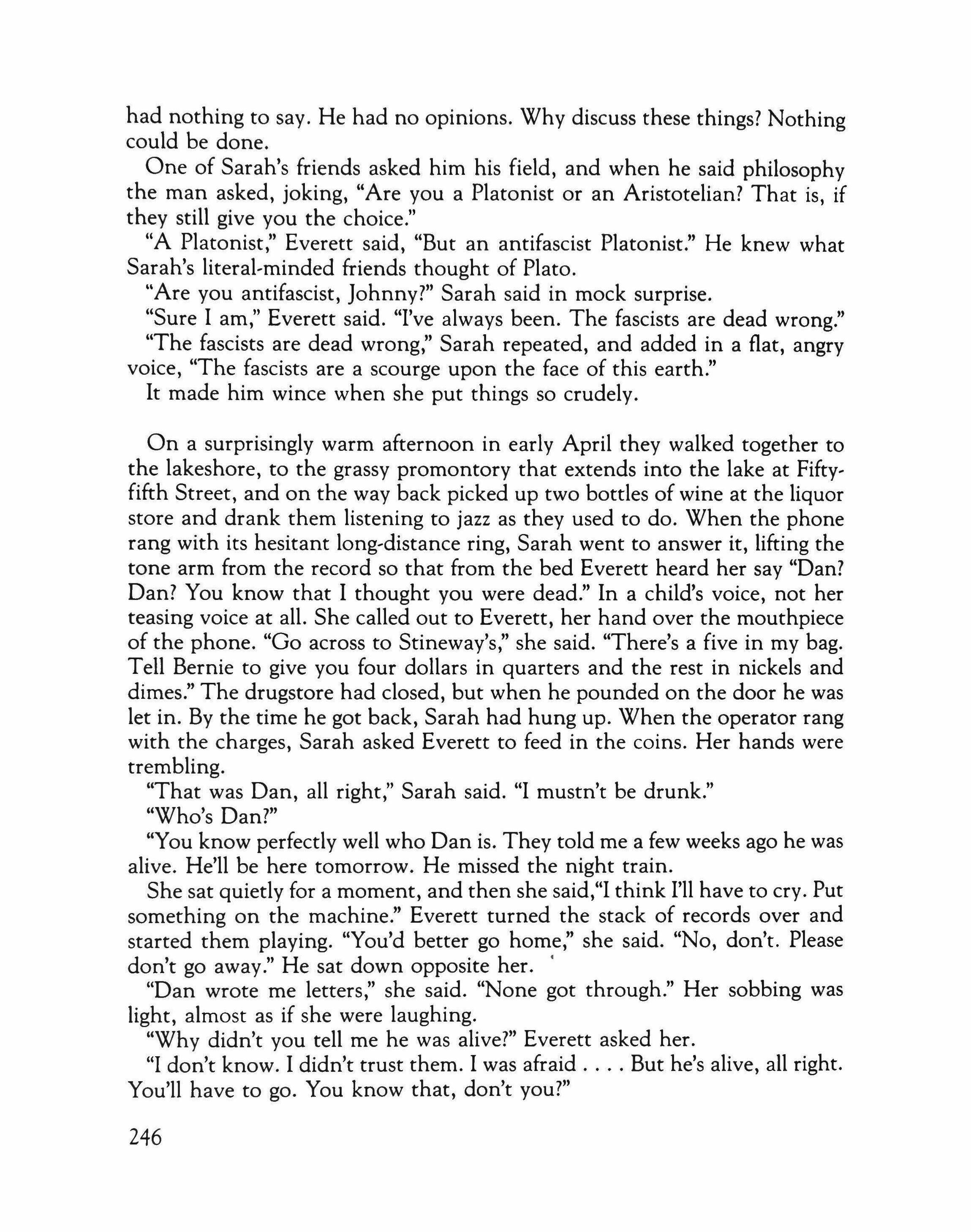
had nothing to say. He had no opinions. Why discuss these things? Nothing could be done.
One of Sarah's friends asked him his field, and when he said philosophy the man asked, joking, "Are you a Platonist or an Aristotelian? That is, if they still give you the choice."
"A Platonist," Everett said, "But an antifascist Platonist." He knew what Sarah's literal-minded friends thought of Plato.
"Are you antifascist, Johnny?" Sarah said in mock surprise.
"Sure I am," Everett said. "I've always been. The fascists are dead wrong."
"The fascists are dead wrong," Sarah repeated, and added in a flat, angry voice, "The fascists are a scourge upon the face of this earth."
It made him wince when she put things so crudely.
On a surprisingly warm afternoon in early April they walked together to the lakeshore, to the grassy promontory that extends into the lake at Fifty, fifth Street, and on the way back picked up two bottles of wine at the liquor store and drank them listening to jazz as they used to do. When the phone rang with its hesitant long-distance ring, Sarah went to answer it, lifting the tone arm from the record so that from the bed Everett heard her say "Dan? Dan? You know that I thought you were dead." In a child's voice, not her teasing voice at all. She called out to Everett, her hand over the mouthpiece of the phone. "Go across to Stineway's," she said. "There's a five in my bag. Tell Bernie to give you four dollars in quarters and the rest in nickels and dimes." The drugstore had closed, but when he pounded on the door he was let in. By the time he got back, Sarah had hung up. When the operator rang with the charges, Sarah asked Everett to feed in the coins. Her hands were trembling.
"That was Dan, all right," Sarah said. "I mustn't be drunk."
"Who's Dan?"
"You know perfectly well who Dan is. They told me a few weeks ago he was alive. He'll be here tomorrow. He missed the night train.
She sat quietly for a moment, and then she said,"I think I'll have to cry. Put something on the machine." Everett turned the stack of records over and started them playing. "You'd better go home," she said. "No, don't. Please don't go away." He sat down opposite her.
"Dan wrote me letters," she said. "None got through." Her sobbing was light, almost as if she were laughing.
"Why didn't you tell me he was alive?" Everett asked her.
"I don't know. I didn't trust them. I was afraid But he's alive, all right. You'll have to go. You know that, don't you?"

He stood up.
"Don't go now," she said. "Just make yourself scarce when he gets here. For hil a wru e.
"O.K.," Everett said. "How long is he going to stay?"
"How long? He's back."
"Do you want him back?"
"Oh, leave me alone, for Christ's sake;' she said.
"Don't worry," he told her. "I've got plenty to do. You won't see me."
"It will be better," she said. "I'm not good for you."
He denied it, though he agreed with her. He stayed until morning.
"The coat;' she said when he left. "It's Dan's."
He brought it back. She felt in the pockets and sleeves and returned his gloves and scarf. "Take your radio," she said.
"Keep it. You listen to the news. Unless he'll wonder who gave it to you."
"He doesn't notice such things."
He went to his room, and a moment later she was at the door. "That was my last five bucks," she said. He gave her a five-dollar bill.
He moved his bed across the room, then went to the Classics library for the day and then to a triple-feature on Cottage Grove that let out well after midnight. While he was fixing breakfast late the next morning, he heard Sarah's voice and Dan's clearly through his door, and then faintly through the wall. Dan's voice wasn't what Everett expected; it was as high-pitched as Jimmy Cagney's. He dressed quickly and left without eating breakfast, slamming the door to his room to tell Sarah that he'd been there and that he was gone.
He saw Dan sitting with Sarah in a window booth when he walked by Stineway's the next day. He was very pale. He didn't look tall; the coat would be big on him too. Sitting there, he seemed just another grad student. No one would take him for a soldier home from the wars.
When Everett got back from the library one afternoon a day or two later, Sarah was in the hall, talking on the phone. She came into his room when she was through. "Dan's downtown at a meeting," she said. He pulled her to him. They lay down on his bed, but then he sat up. "I can't do this," he said.
They lit cigarettes. "Is he all right?" Everett asked her.
"He wasn't wounded, if that's what you mean."
"Was he in the fighting? Someone told me he was a colonel in the Lincoln Battalion."
"He was attached to the Battalion for a while;' she said. "He was in liaison work. He wasn't even there at the end. He was in France. Then Moscow."
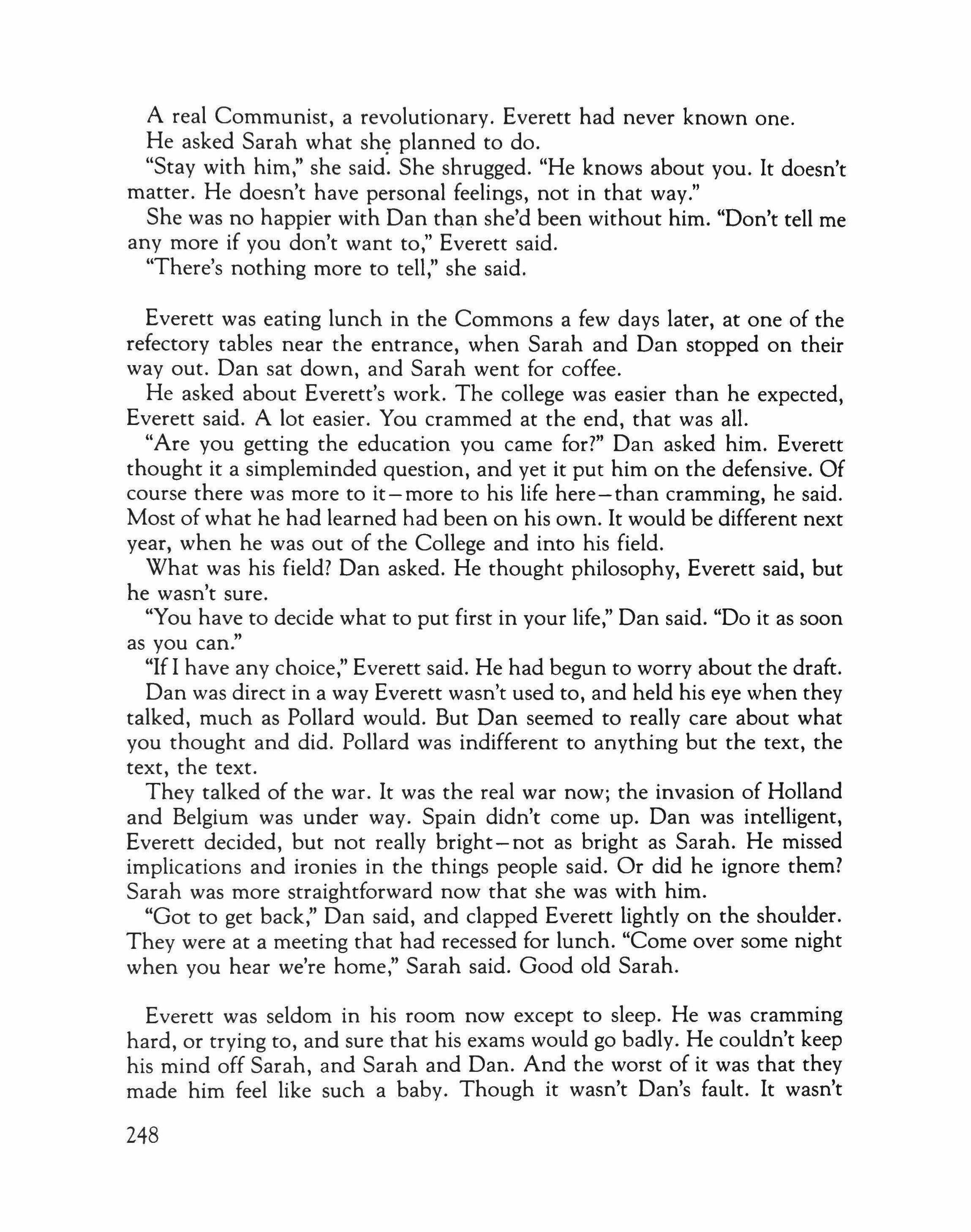
A real Communist, a revolutionary. Everett had never known one. He asked Sarah what she planned to do.
"Stay with him," she said. She shrugged. "He knows about you. It doesn't matter. He doesn't have personal feelings, not in that way."
She was no happier with Dan than she'd been without him. "Don't tell me any more if you don't want to," Everett said.
"There's nothing more to tell," she said.
Everett was eating lunch in the Commons a few days later, at one of the refectory tables near the entrance, when Sarah and Dan stopped on their way out. Dan sat down, and Sarah went for coffee.
He asked about Everett's work. The college was easier than he expected, Everett said. A lot easier. You crammed at the end, that was all.
"Are you getting the education you came for?" Dan asked him. Everett thought it a simpleminded question, and yet it put him on the defensive. Of course there was more to it-more to his life here-than cramming, he said. Most of what he had learned had been on his own. It would be different next year, when he was out of the College and into his field.
What was his field? Dan asked. He thought philosophy, Everett said, but he wasn't sure.
"You have to decide what to put first in your life," Dan said. "Do it as soon as you can."
"If I have any choice," Everett said. He had begun to worry about the draft.
Dan was direct in a way Everett wasn't used to, and held his eye when they talked, much as Pollard would. But Dan seemed to really care about what you thought and did. Pollard was indifferent to anything but the text, the text, the text.
They talked of the war. It was the real war now; the invasion of Holland and Belgium was under way. Spain didn't come up. Dan was intelligent, Everett decided, but not really bright-not as bright as Sarah. He missed implications and ironies in the things people said. Or did he ignore them? Sarah was more straightforward now that she was with him.
"Got to get back," Dan said, and clapped Everett lightly on the shoulder. They were at a meeting that had recessed for lunch. "Come over some night when you hear we're home," Sarah said. Good old Sarah.
Everett was seldom in his room now except to sleep. He was cramming hard, or trying to, and sure that his exams would go badly. He couldn't keep his mind off Sarah, and Sarah and Dan. And the worst of it was that they made him feel like such a baby. Though it wasn't Dan's fault. It wasn't
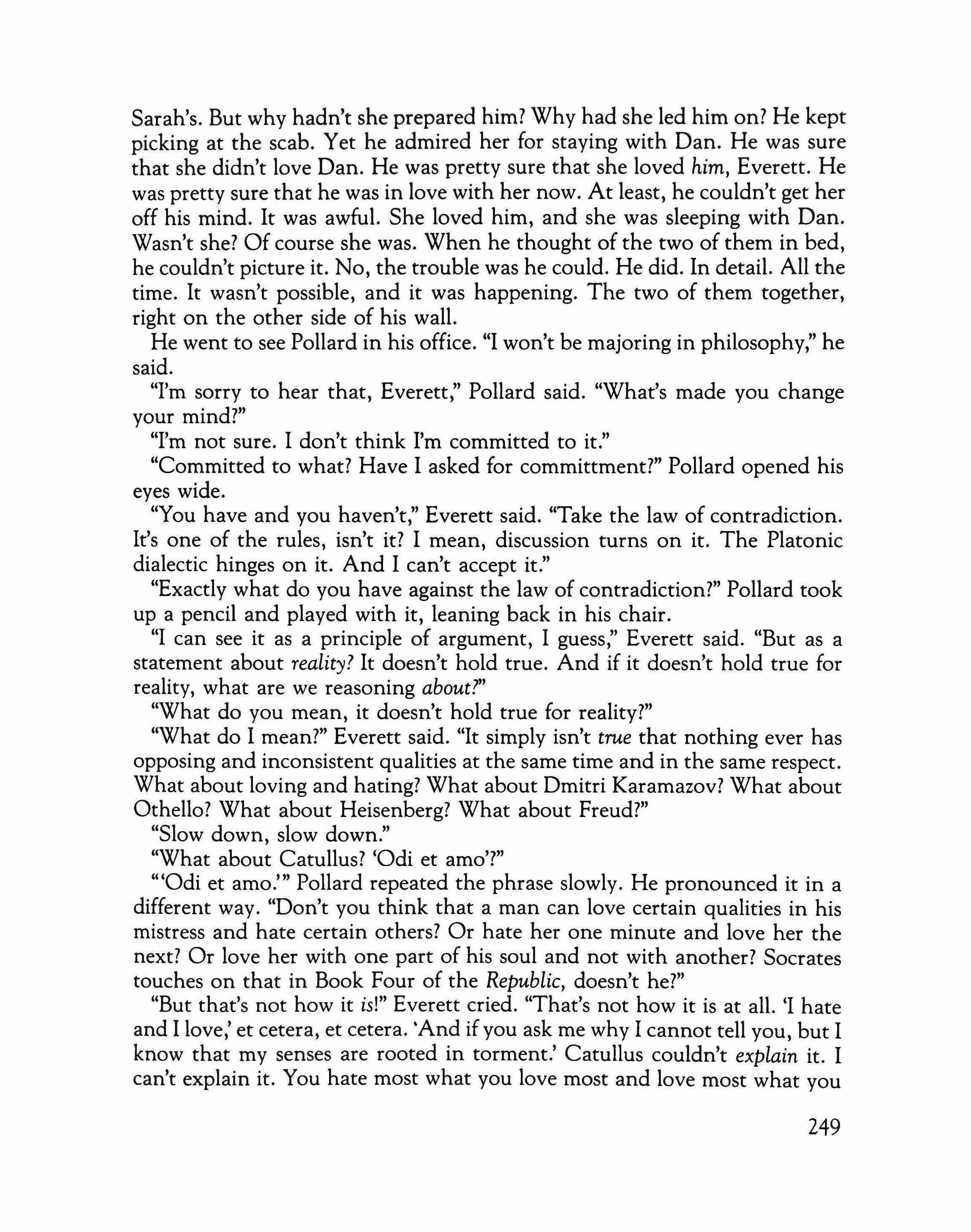
Sarah's. But why hadn't she prepared him? Why had she led him on? He kept picking at the scab. Yet he admired her for staying with Dan. He was sure that she didn't love Dan. He was pretty sure that she loved him, Everett. He was pretty sure that he was in love with her now. At least, he couldn't get her off his mind. It was awful. She loved him, and she was sleeping with Dan. Wasn't she? Of course she was. When he thought of the two of them in bed, he couldn't picture it. No, the trouble was he could. He did. In detail. All the time. It wasn't possible, and it was happening. The two of them together, right on the other side of his wall.
He went to see Pollard in his office. "I won't be majoring in philosophy," he said.
"I'm sorry to hear that, Everett;' Pollard said. "What's made you change your mind?"
"I'm not sure. I don't think I'm committed to it."
"Committed to what? Have I asked for committment?" Pollard opened his eyes wide.
"You have and you haven't," Everett said. "Take the law of contradiction. It's one of the rules, isn't it? I mean, discussion turns on it. The Platonic dialectic hinges on it. And I can't accept it."
"Exactly what do you have against the law of contradiction?" Pollard took up a pencil and played with it, leaning back in his chair.
"I can see it as a principle of argument, I guess," Everett said. "But as a statement about reality? It doesn't hold true. And if it doesn't hold true for reality, what are we reasoning about?"
"What do you mean, it doesn't hold true for reality?"
"What do I mean?" Everett said. "It simply isn't true that nothing ever has opposing and inconsistent qualities at the same time and in the same respect. What about loving and hating? What about Dmitri Karamazov? What about Othello? What about Heisenberg? What about Freud?"
"Slow down, slow down."
"What about Catullus? 'Odi et amo?"
"'Odi et amo.'" Pollard repeated the phrase slowly. He pronounced it in a different way. "Don't you think that a man can love certain qualities in his mistress and hate certain others? Or hate her one minute and love her the next? Or love her with one part of his soul and not with another? Socrates touches on that in Book Four of the Republic, doesn't he?"
"But that's not how it is!" Everett cried. "That's not how it is at all. 'I hate and I love,' et cetera, et cetera. 'And if you ask me why I cannot tell you, but I know that my senses are rooted in torment.' Catullus couldn't explain it. I can't explain it. You hate most what you love most and love most what you
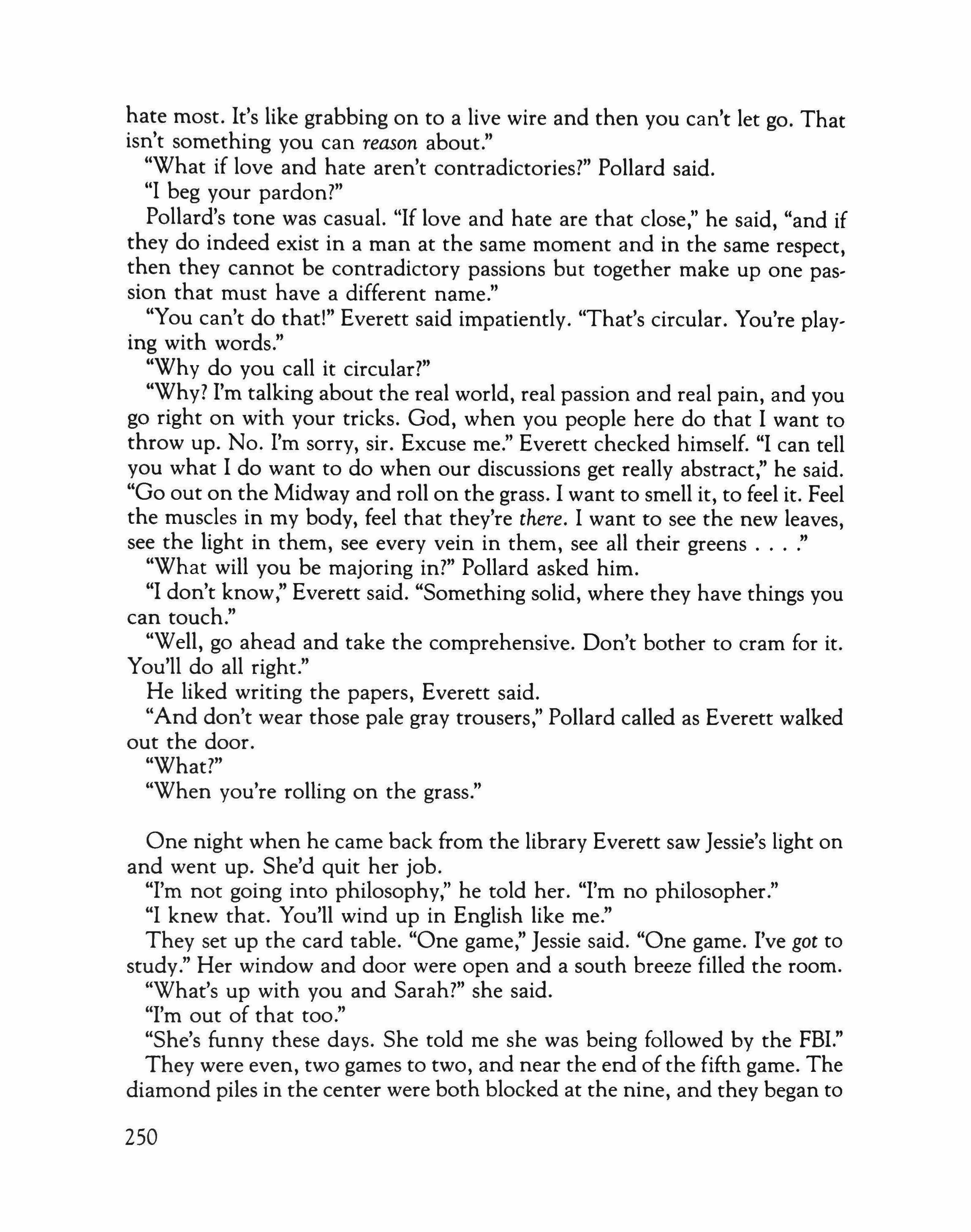
hate most. It's like grabbing on to a live wire and then you can't let go. That isn't something you can reason about."
"What if love and hate aren't contradictories?" Pollard said.
"I beg your pardon?"
Pollard's tone was casual. "If love and hate are that close," he said, "and if they do indeed exist in a man at the same moment and in the same respect, then they cannot be contradictory passions but together make up one pas, sion that must have a different name."
"You can't do that!" Everett said impatiently. 'That's circular. You're play, ing with words."
"Why do you call it circular?"
"Why? I'm talking about the real world, real passion and real pain, and you go right on with your tricks. God, when you people here do that I want to throw up. No. I'm sorry, sir. Excuse me." Everett checked himself. "I can tell you what I do want to do when our discussions get really abstract:' he said. "Go out on the Midway and roll on the grass. I want to smell it, to feel it. Feel the muscles in my body, feel that they're there. I want to see the new leaves, see the light in them, see every vein in them, see all their greens
"What will you be majoring in?" Pollard asked him.
"I don't know:' Everett said. "Something solid, where they have things you can touch."
"Well, go ahead and take the comprehensive. Don't bother to cram for it. You'll do all right."
He liked writing the papers, Everett said.
"And don't wear those pale gray trousers," Pollard called as Everett walked out the door.
"What?"
"When you're rolling on the grass."
One night when he came back from the library Everett saw Jessie's light on and went up. She'd quit her job.
"I'm not going into philosophy," he told her. "I'm no philosopher."
"I knew that. You'll wind up in English like me."
They set up the card table. "One game," Jessie said. "One game. I've got to study." Her window and door were open and a south breeze filled the room.
"What's up with you and Sarah?" she said.
"I'm out of that too."
"She's funny these days. She told me she was being followed by the FB!."
They were even, two games to two, and near the end of the fifth game. The diamond piles in the center were both blocked at the nine, and they began to
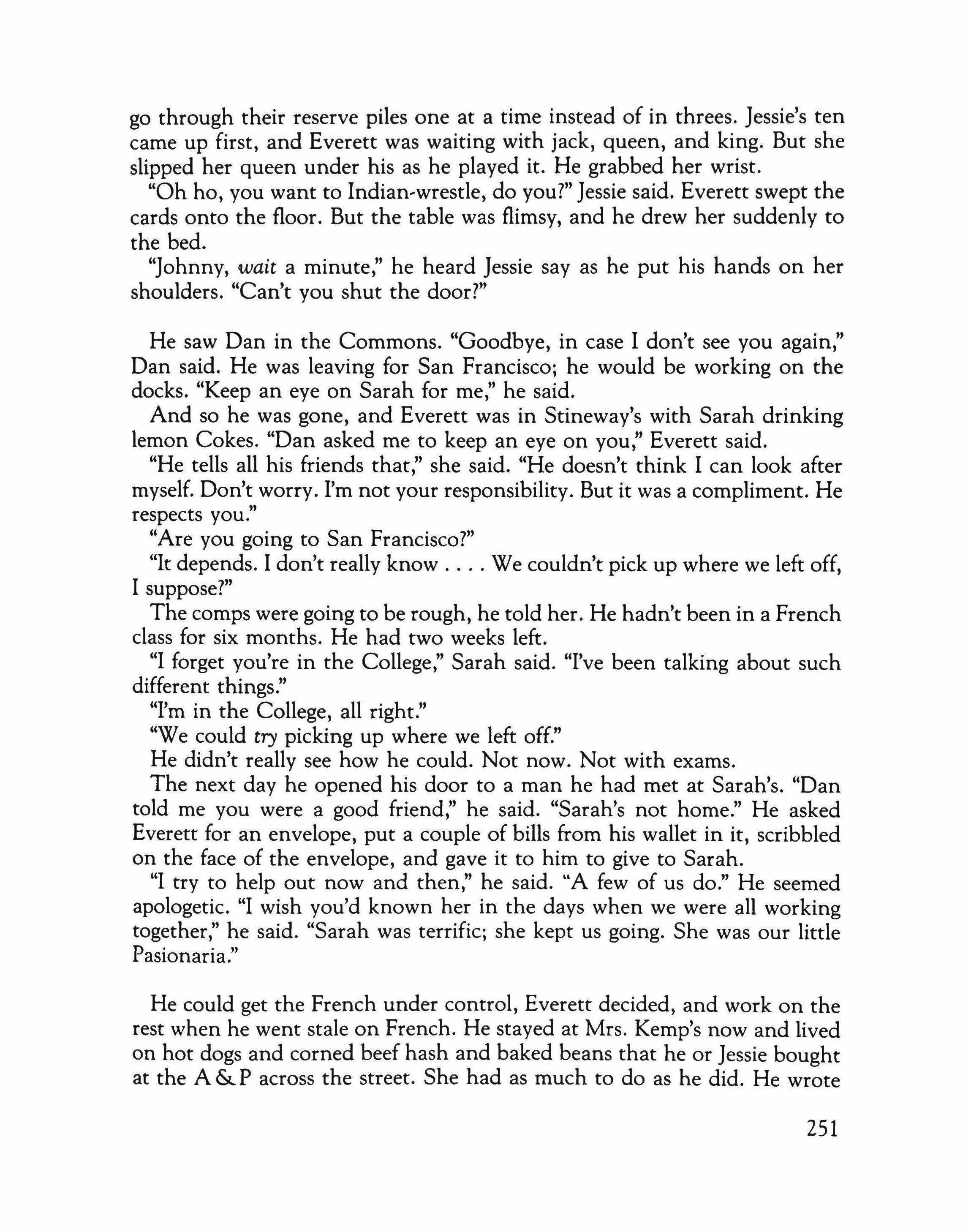
go through their reserve piles one at a time instead of in threes. Jessie's ten came up first, and Everett was waiting with jack, queen, and king. But she slipped her queen under his as he played it. He grabbed her wrist.
"Oh ho, you want to Indian-wrestle, do you?" Jessie said. Everett swept the cards onto the floor. But the table was flimsy, and he drew her suddenly to the bed.
"Johnny, wait a minute;' he heard Jessie say as he put his hands on her shoulders. "Can't you shut the door?"
He saw Dan in the Commons. "Goodbye, in case I don't see you again," Dan said. He was leaving for San Francisco; he would be working on the docks. "Keep an eye on Sarah for me," he said.
And so he was gone, and Everett was in Stineway's with Sarah drinking lemon Cokes. "Dan asked me to keep an eye on you;' Everett said.
"He tells all his friends that," she said. "He doesn't think I can look after myself. Don't worry. I'm not your responsibility. But it was a compliment. He respects you."
"Are you going to San Francisco?"
"It depends. I don't really know We couldn't pick up where we left off, I suppose?"
The comps were going to be rough, he told her. He hadn't been in a French class for six months. He had two weeks left.
"I forget you're in the College," Sarah said. "I've been talking about such different things."
"I'm in the College, all right."
"We could try picking up where we left off."
He didn't really see how he could. Not now. Not with exams.
The next day he opened his door to a man he had met at Sarah's. "Dan told me you were a good friend," he said. "Sarah's not home." He asked Everett for an envelope, put a couple of bills from his wallet in it, scribbled on the face of the envelope, and gave it to him to give to Sarah.
"I try to help out now and then," he said. "A few of us do." He seemed apologetic. "I wish you'd known her in the days when we were all working together," he said. "Sarah was terrific; she kept us going. She was our little Pasionaria."
He could get the French under control, Everett decided, and work on the rest when he went stale on French. He stayed at Mrs. Kemp's now and lived on hot dogs and corned beef hash and baked beans that he or Jessie bought at the A & P across the street. She had as much to do as he did. He wrote
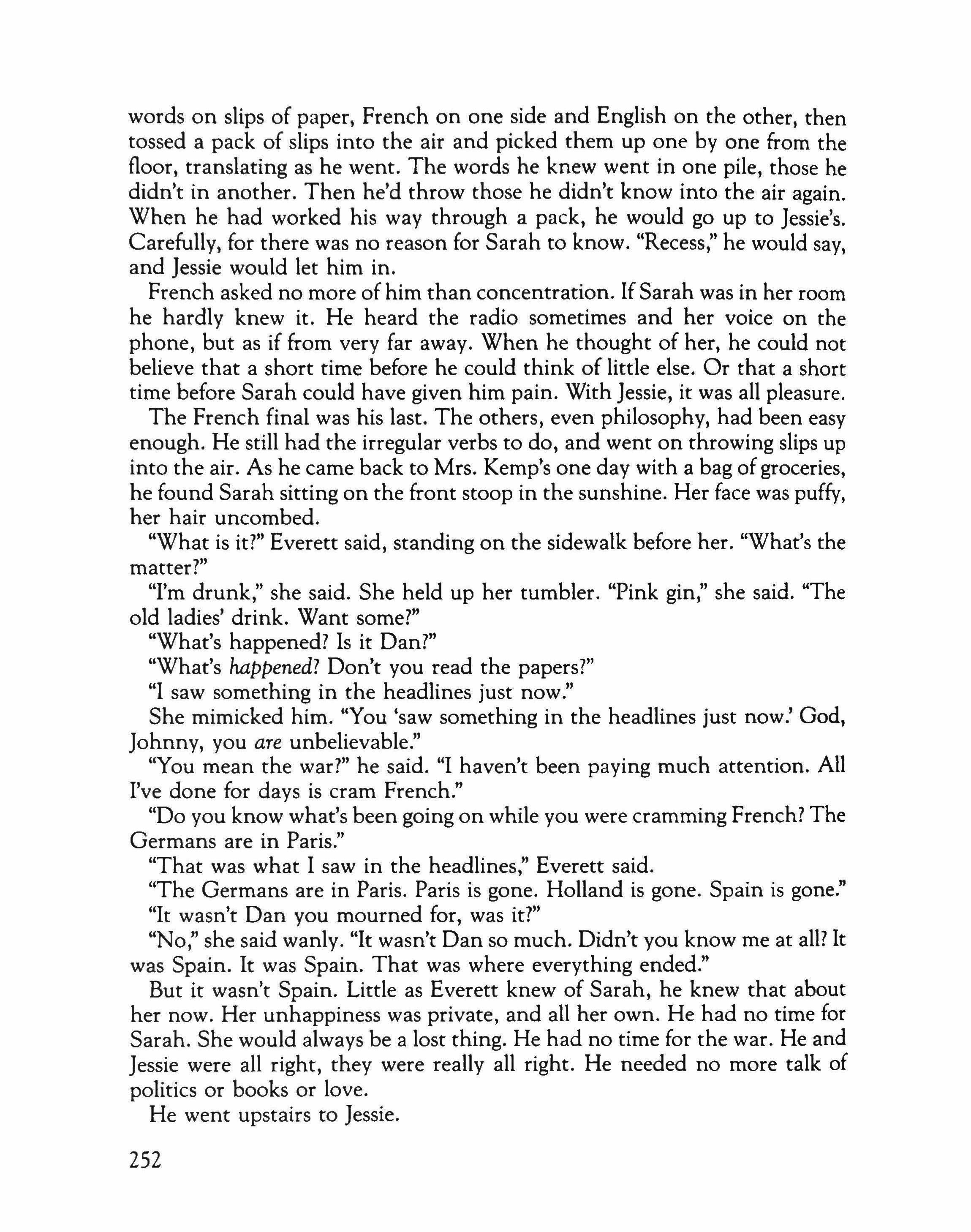
words on slips of paper, French on one side and English on the other, then tossed a pack of slips into the air and picked them up one by one from the floor, translating as he went. The words he knew went in one pile, those he didn't in another. Then he'd throw those he didn't know into the air again. When he had worked his way through a pack, he would go up to jessie's. Carefully, for there was no reason for Sarah to know. "Recess," he would say, and jessie would let him in.
French asked no more of him than concentration. If Sarah was in her room he hardly knew it. He heard the radio sometimes and her voice on the phone, but as if from very far away. When he thought of her, he could not believe that a short time before he could think of little else. Or that a short time before Sarah could have given him pain. With jessie, it was all pleasure.
The French final was his last. The others, even philosophy, had been easy enough. He still had the irregular verbs to do, and went on throwing slips up into the air. As he came back to Mrs. Kemp's one day with a bag ofgroceries, he found Sarah sitting on the front stoop in the sunshine. Her face was puffy, her hair uncombed.
"What is it?" Everett said, standing on the sidewalk before her. "What's the matter?"
"I'm drunk," she said. She held up her tumbler. "Pink gin," she said. "The old ladies' drink. Want some?"
"What's happened? Is it Dan?"
"What's happened? Don't you read the papers?"
"I saw something in the headlines just now."
She mimicked him. "You 'saw something in the headlines just now.' God, johnny, you are unbelievable."
"You mean the war?" he said. "I haven't been paying much attention. All I've done for days is cram French."
"Do you know what's been going on while you were cramming French? The Germans are in Paris."
"That was what I saw in the headlines," Everett said.
"The Germans are in Paris. Paris is gone. Holland is gone. Spain is gone."
"It wasn't Dan you mourned for, was it?"
"No," she said wanly. "It wasn't Dan so much. Didn't you know me at all? It was Spain. It was Spain. That was where everything ended."
But it wasn't Spain. Little as Everett knew of Sarah, he knew that about her now. Her unhappiness was private, and all her own. He had no time for Sarah. She would always be a lost thing. He had no time for the war. He and jessie were all right, they were really all right. He needed no more talk of politics or books or love.
He went upstairs to jessie.
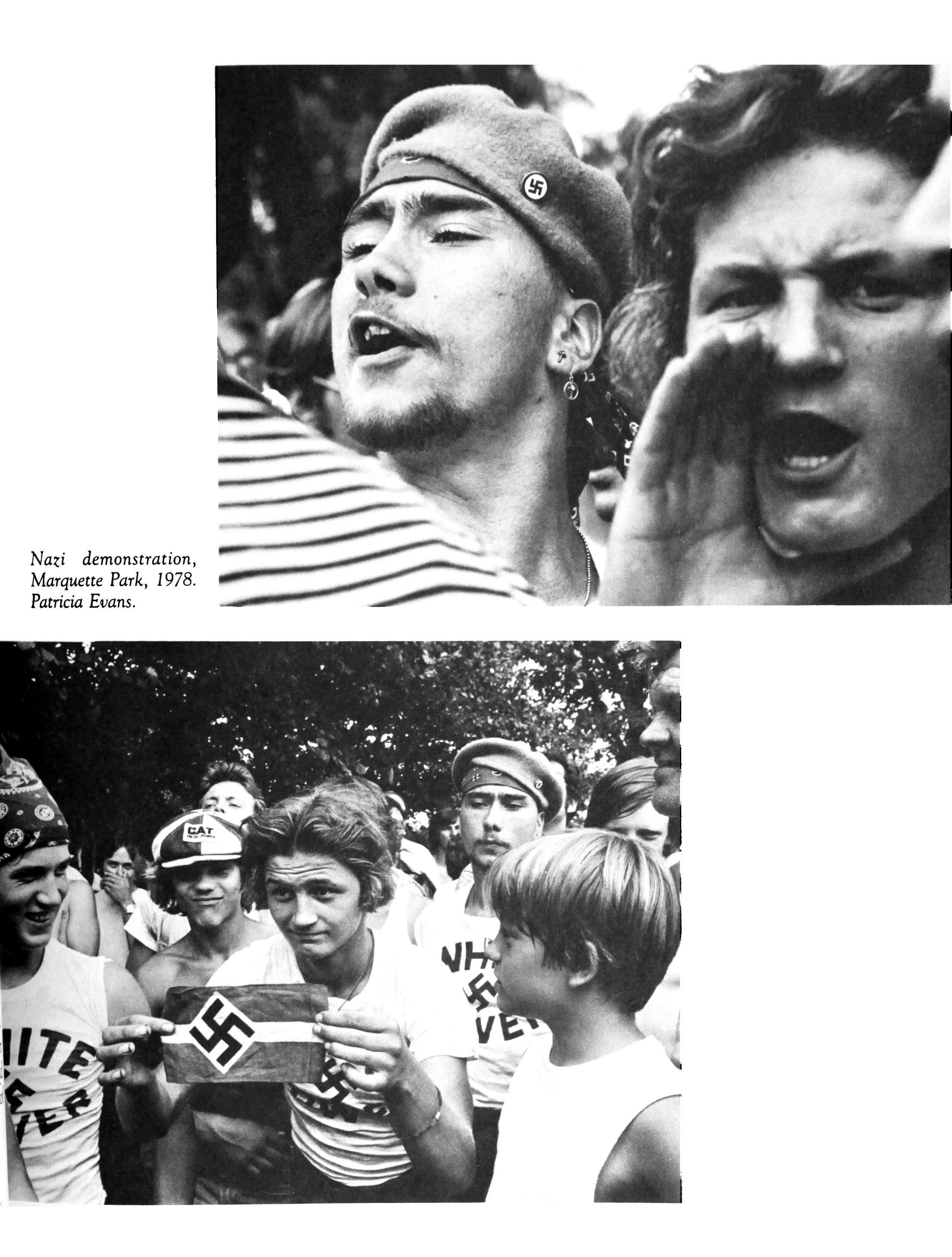
Nazi demonstration, Marquette Park, 1978. Patricia Evans.
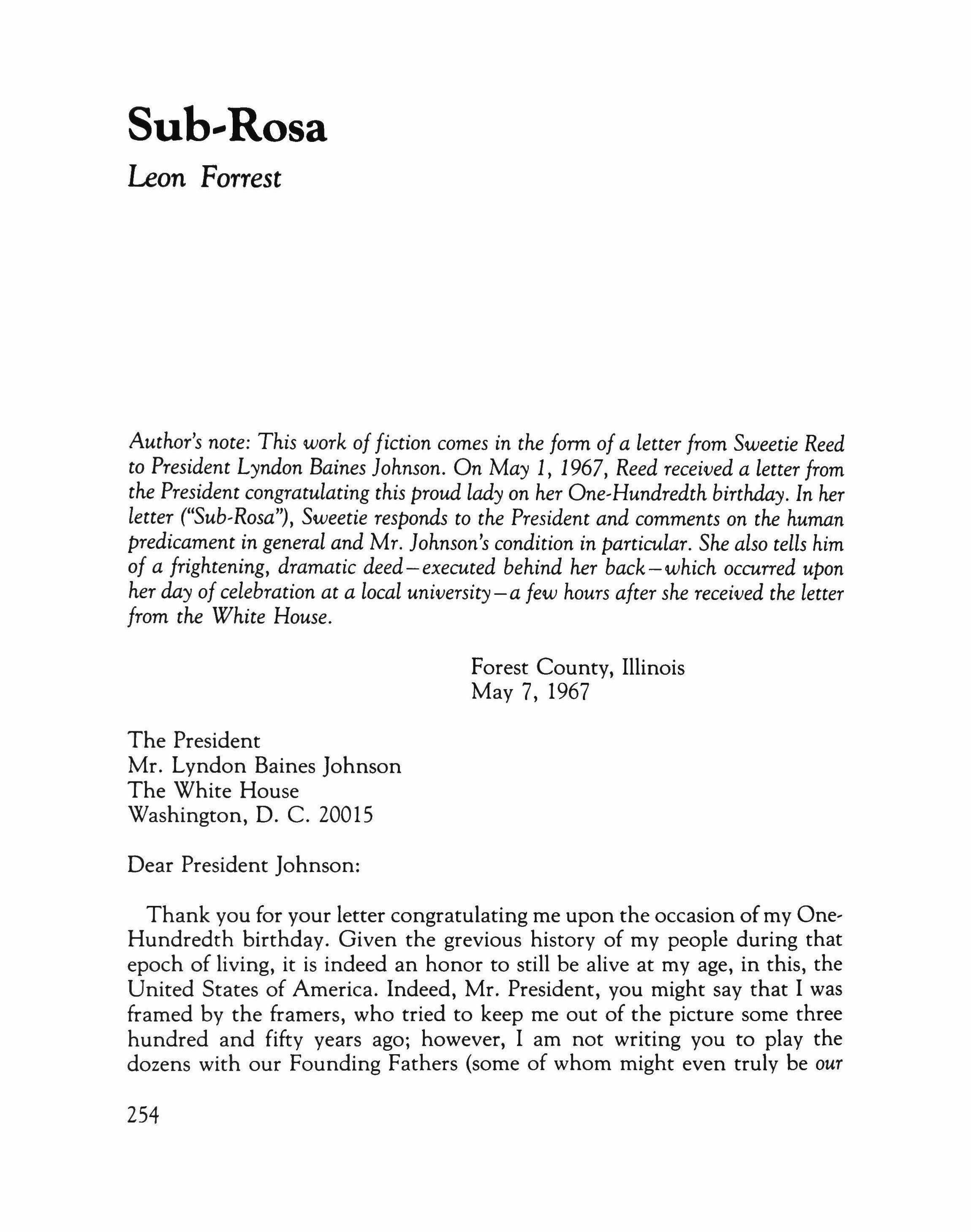
Author's note: This work offiction comes in the form of a letter from Sweetie Reed to President Lyndon Baines Johnson. On May 1, 1967, Reed received a letter from the President congratulating this proud lady on her One�Hundredth birthday. In her letter ("Sub�Rosa"), Sweetie responds to the President and comments on the human predicament in general and Mr. Johnson's condition in particular. She also tells him of a frightening, dramatic deed-executed behind her back-which occurred upon her day of celebration at a local university-a few hours after she received the letter from the White House.
Forest County, Illinois May 7, 1967
The President
Mr. Lyndon Baines Johnson
The White House
Washington, D. C. 20015
Dear President Johnson:
Thank you for your letter congratulating me upon the occasion of my OneHundredth birthday. Given the grevious history of my people during that epoch of living, it is indeed an honor to still be alive at my age, in this, the United States of America. Indeed, Mr. President, you might say that I was framed by the framers, who tried to keep me out of the picture some three hundred and fifty years ago; however, I am not writing you to play the dozens with our Founding Fathers (some of whom might even truly be our

American cousins) and some of whom acted-out like motherless children all of their natural days in the White House.
But Mr. President, there is an eagle in my soul, and so I am writing to you personally (and not through a form letter, nor a third party) in order to attempt to set the record straight, yet it won't get straightened out until you and I are straight, and we won't be straight until God straightens us all out in a desegregated graveyard - and He returns to gather up His elect and holds one grand finale-grave eruption-supreme court hearing over this troubled land, concerning the revelations of our genesis When He opens up those graveyards and calls for a show-down of souls-stuffed shirts won't count. When He returns to this troubled land and grave locked-jaws crack, as loose tongues in sinister sleep.
And I also want to give you a few wreathes to place in your memory bank, Mr. President, and at the graves ofthe unknown soldiers of the Cross: Ladies long since dead in the long-ago past
Now Mr. President, some phased-out folks picture this War on Poverty of yours as the Second Coming, instead of another face on the old second chance. Others see it as yet another trick of yours to get votes. And if you were to ask them the time of day, they'd look you right dead in the face to see if they could spy a sly quarter moon in back of your eyeballs, at high noon. For them, of course, you could never do right for doing wrong, in order to keep the right confused by the left. They don't think you would rightly segregate the chaff from the wheat without your having a deal with Satan to turn that chaff into kindling for Hell's flames in auction for a pitchfork of votes from across the aisle, on Judgement Day So help you God
And so, Mr. President, when you declared, "And We Shall Overcome" before the Nation (and the Joint Chambers of Congress) many accused you of stealing a line from Dr. King for the sake of tricknology; and when you worked to speed the Voting Rights bill, they were certain that you had what my former husband, a lawyer-jurist, used to call "Ulterior Motives." They even swore that you signed that bill with invisible ink and in ten years that law will be without wisdom teeth, lest fixed bayonets are returned to the South. Some even swear upon a stack of bibles, and with a straight face, that your push for the Public Accommodations bill resulted from secret stock you and Lady Bird have in Neiman and Marcus and that you are trying to open up things so as to close in on all that upper-crust Negro money market in Texas.
Well, I'm not too upset over your accent, Mr. President, I'm more worried about what you accent and don't accent. Why the Public Accommodations
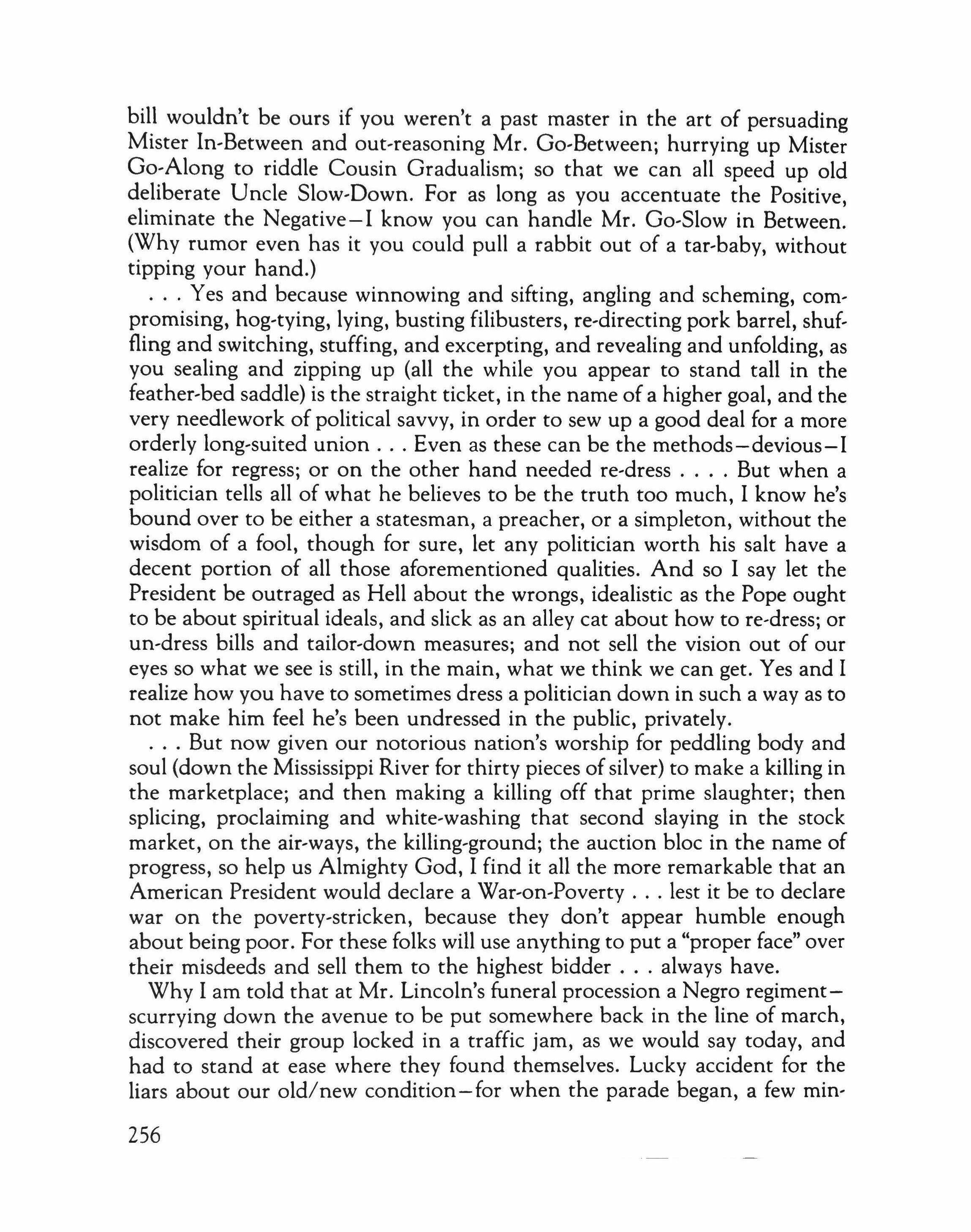
bill wouldn't be ours if you weren't a past master in the art of persuading Mister In-Between and out-reasoning Mr. Go-Between; hurrying up Mister Go-Along to riddle Cousin Gradualism; so that we can all speed up old deliberate Uncle Slow-Down, For as long as you accentuate the Positive, eliminate the Negative-I know you can handle Mr. Go-Slow in Between. (Why rumor even has it you could pull a rabbit out of a tar-babv, without tipping your hand.)
Yes and because winnowing and sifting, angling and scheming, cornpromising, hog-tying, lying, busting filibusters, re-directing pork barrel, shuffling and switching, stuffing, and excerpting, and revealing and unfolding, as you sealing and zipping up (all the while you appear to stand tall in the feather-bed saddle) is the straight ticket, in the name of a higher goal, and the very needlework of political savvy, in order to sew up a good deal for a more orderly long-suited union Even as these can be the methods-devious-I realize for regress; or on the other hand needed re-dress But when a politician tells all of what he believes to be the truth too much, I know he's bound over to be either a statesman, a preacher, or a simpleton, without the wisdom of a fool, though for sure, let any politician worth his salt have a decent portion of all those aforementioned qualities. And so I say let the President be outraged as Hell about the wrongs, idealistic as the Pope ought to be about spiritual ideals, and slick as an alley cat about how to re-dress; or un-dress bills and tailor-down measures; and not sell the vision out of our eyes so what we see is still, in the main, what we think we can get. Yes and I realize how you have to sometimes dress a politician down in such a way as to not make him feel he's been undressed in the public, privately
But now given our notorious nation's worship for peddling body and soul (down the Mississippi River for thirty pieces ofsilver) to make a killing in the marketplace; and then making a killing off that prime slaughter; then splicing, proclaiming and white-washing that second slaying in the stock market, on the air-ways, the killing-ground; the auction bloc in the name of progress, so help us Almighty God, I find it all the more remarkable that an American President would declare a War�on�Poverty lest it be to declare war on the poverty-stricken, because they don't appear humble enough about being poor. For these folks will use anything to put a "proper face" over their misdeeds and sell them to the highest bidder always have.
Why I am told that at Mr. Lincoln's funeral procession a Negro regimentscurrying down the avenue to be put somewhere back in the line of march, discovered their group locked in a traffic jam, as we would say today, and had to stand at ease where they found themselves. Lucky accident for the liars about our old/new condition-for when the parade began, a few min-

utes later, the Colored soldiers found themselves placed at the very head of the whole procedure Didn't it go across the land that the new freedmenthe President's grandest achievement - were advanced ahead of all the mourners, as tribute, at the Redeemer's obsequies? Talk about the state of the union. Why the next thing you know, they'll have somebody peddling steamy air in helium balloons to the highest bidder proclaiming it was swooped up from hot air in the sleeping room where Miss Elizabeth Taylor snuggled.
No Mr. President, I, myself, praise you for that part of your effort to eradicate and build-to the highest, but I condemn the make-shift shiftless manifestations of parts of this poverty-stricken program, and some of the rogues in sheep's clothing and the winesap servants in it, that mine eyes have beheld in these vainglorious Urban Progress Centers, in this very Forest County, leastways. Some of their leaders are always defining, and re-defining the problem-so that after a while you realize that they are the problem, about the same time you commence to remembering what was the question.
Why some of the very folks running these programs-the ones assigned to going around taking names-most truly aren't able to fill out forms properly. Their spelling is as retarded as an unlettered page-boy. Why when my Grandkin, Nathaniel Witherspoon, was in grade school, they had what they called the Dummy Room and some of these self-same people would belong there if! had anything to say about it. I'd also send alongJerry Ford, and that man who comes on television too often, the demented woodpecker, Eric Severeid; he's part of the reason why I stopped watching television, for the most part. Oh we'd have us quite a classroom, alright Maybe you could establish a center for them in the ante-room there in the White House, next to the Rose Garden, so that they can be retrained and watched over for the good of progress. Now not all of them, but a great many of them take too many coffee'breakers, away from the desk. And they got more forms to fill out than those social workers have to fill out to get a pregnant mother an extra bottle of Borden's milk.
It sorely wasn't your intention, but let me hasten to tell you that we are creating yet another flooring for jiving off; they aren't learning anything sound, true, useable, skillful, mathematical, that they can employ at the summit The salaries they are receiving come out to be hush money. They are developing less skill than the numbers runners - who all the time running boot-legging games on our folks down here in the slums Going around taking down numbered dreams, in the Peg-Leg book or writing Clearing, house. The runners got a flooring in the confusion of awakened dreams but what are these new poverty-folks going to do when you leave office, Mr.
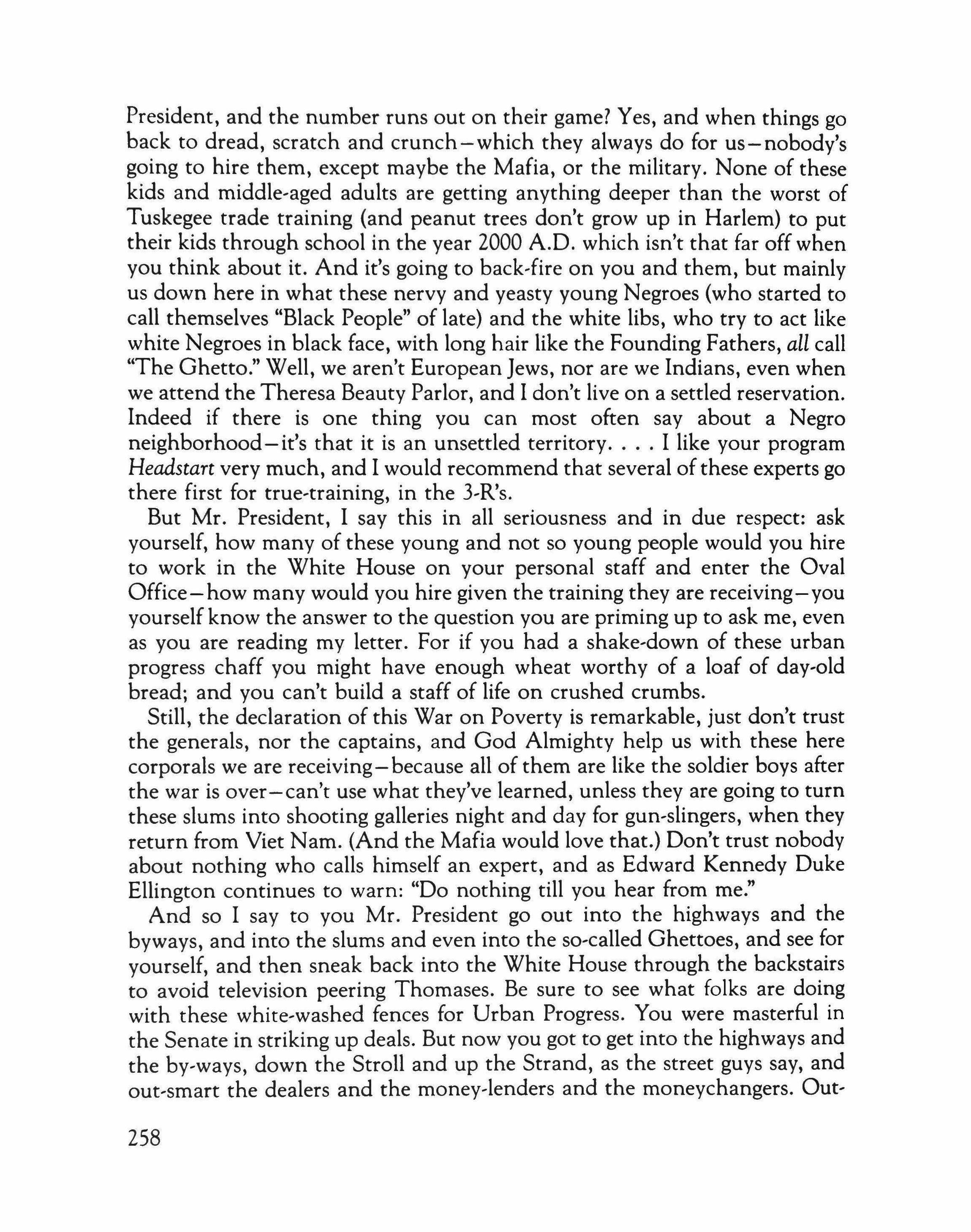
President, and the number runs out on their game? Yes, and when things go back to dread, scratch and crunch-which they always do for us-nobody's going to hire them, except maybe the Mafia, or the military. None of these kids and middle,aged adults are getting anything deeper than the worst of Tuskegee trade training (and peanut trees don't grow up in Harlem) to put their kids through school in the year 2000 A.D. which isn't that far off when you think about it. And it's going to back-fire on you and them, but mainly us down here in what these nervy and yeasty young Negroes (who started to call themselves "Black People" of late) and the white libs, who try to act like white Negroes in black face, with long hair like the Founding Fathers, all call "The Ghetto." Well, we aren't European Jews, nor are we Indians, even when we attend the Theresa Beauty Parlor, and I don't live on a settled reservation. Indeed if there is one thing you can most often say about a Negro neighborhood - it's that it is an unsettled territory. I like your program Headstart very much, and I would recommend that several ofthese experts go there first for true-training, in the 3,R's.
But Mr. President, I say this in all seriousness and in due respect: ask yourself, how many of these young and not so young people would you hire to work in the White House on your personal staff and enter the Oval Office-how many would you hire given the training they are receiving-you yourself know the answer to the question you are priming up to ask me, even as you are reading my letter. For if you had a shake-down of these urban progress chaff you might have enough wheat worthy of a loaf of day-old bread; and you can't build a staff of life on crushed crumbs.
Still, the declaration of this War on Poverty is remarkable, just don't trust the generals, nor the captains, and God Almighty help us with these here corporals we are receiving-because all of them are like the soldier boys after the war is over-can't use what they've learned, unless they are going to turn these slums into shooting galleries night and day for gun-slingers, when they return from Viet Nam. (And the Mafia would love that.) Don't trust nobody about nothing who calls himself an expert, and as Edward Kennedy Duke Ellington continues to warn: "Do nothing till you hear from me."
And so I say to you Mr. President go out into the highways and the byways, and into the slums and even into the so-called Ghettoes, and see for yourself, and then sneak back into the White House through the backstairs to avoid television peering Thomases. Be sure to see what folks are doing with these white-washed fences for Urban Progress. You were masterful in the Senate in striking up deals. But now you got to get into the highways and the by-ways, down the Stroll and up the Strand, as the street guys say, and out-smart the dealers and the money-lenders and the moneychangers. Out'
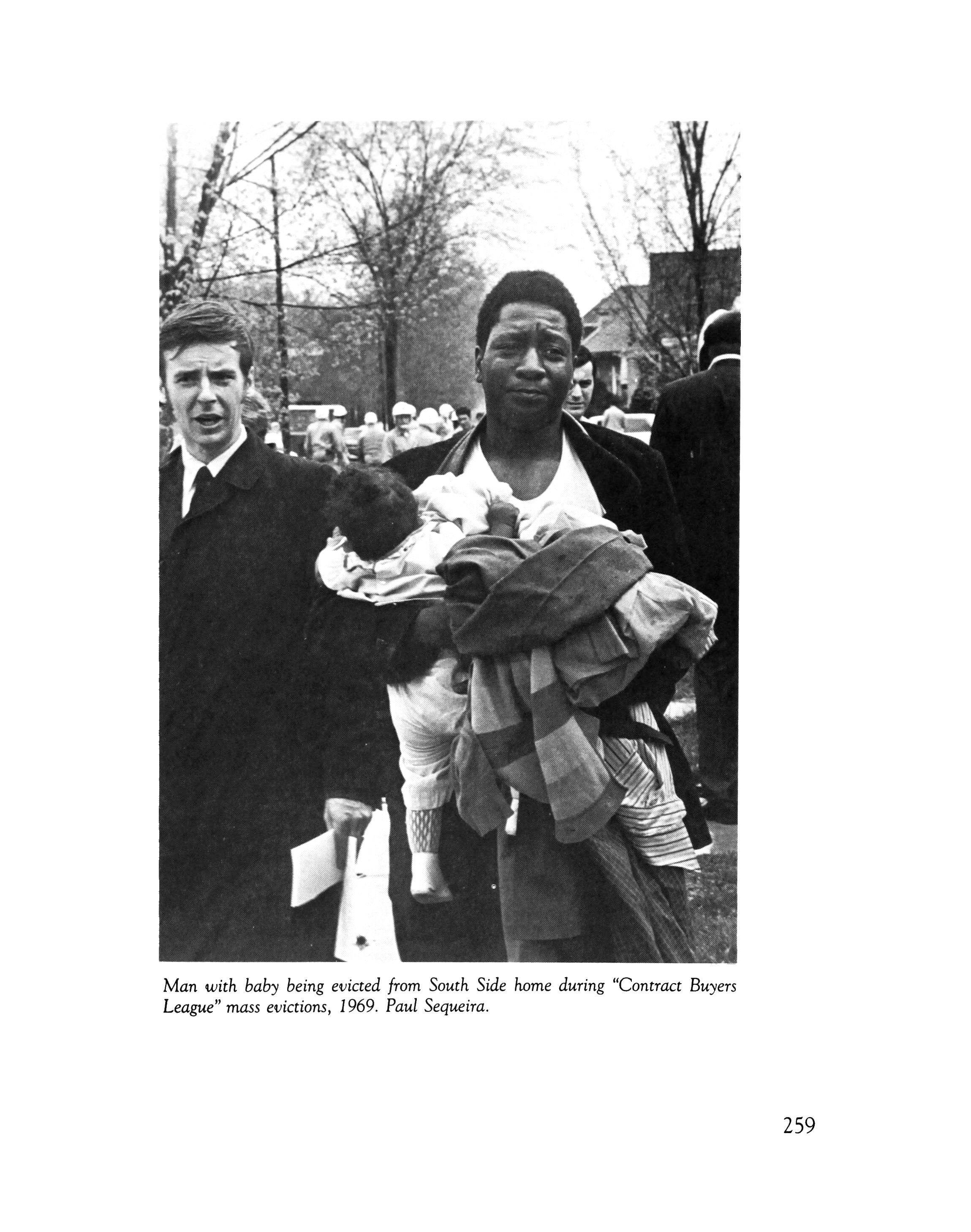
Man with baby being evicted from South Side home during "Contract Buyers League" mass evictions, 1969. Paul Sequeira.
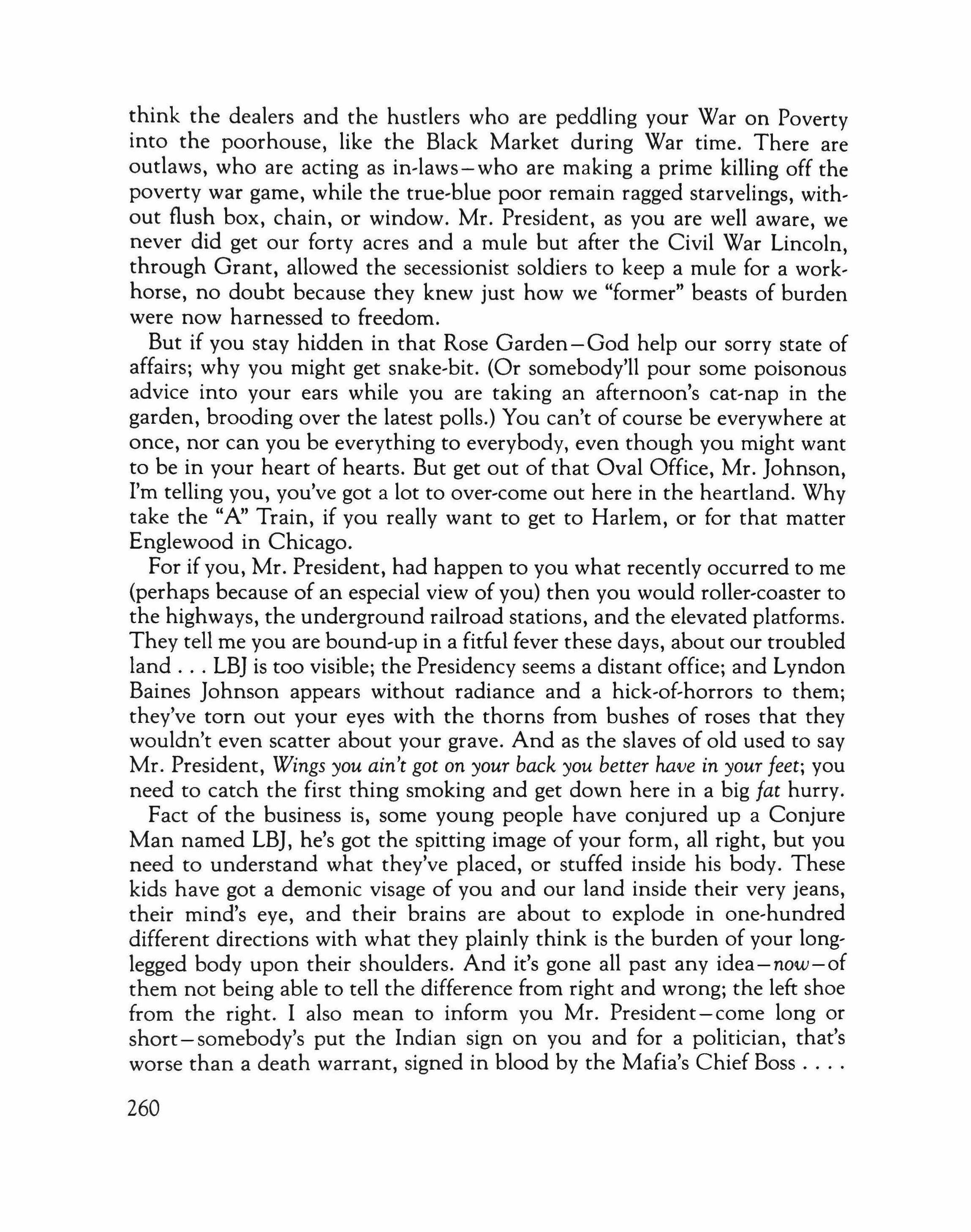
think the dealers and the hustlers who are peddling your War on Poverty into the poorhouse, like the Black Market during War time. There are outlaws, who are acting as in-laws=who are making a prime killing off the poverty war game, while the true-blue poor remain ragged starvelings, with, out flush box, chain, or window. Mr. President, as you are well aware, we never did get our forty acres and a mule but after the Civil War Lincoln, through Grant, allowed the secessionist soldiers to keep a mule for a work, horse, no doubt because they knew just how we "former" beasts of burden were now harnessed to freedom.
But if you stay hidden in that Rose Garden-God help our sorry state of affairs; why you might get snake-bit. (Or somebody'll pour some poisonous advice into your ears while you are taking an afternoon's cat-nap in the garden, brooding over the latest polls.) You can't of course be everywhere at once, nor can you be everything to everybody, even though you might want to be in your heart of hearts. But get out of that Oval Office, Mr. Johnson, I'm telling you, you've got a lot to over-come out here in the heartland. Why take the "A" Train, if you really want to get to Harlem, or for that matter Englewood in Chicago.
For if you, Mr. President, had happen to you what recently occurred to me (perhaps because of an especial view of you) then you would roller-coaster to the highways, the underground railroad stations, and the elevated platforms. They tell me you are bound-up in a fitful fever these days, about our troubled land LBJ is too visible; the Presidency seems a distant office; and Lyndon Baines Johnson appears without radiance and a hick-of-horrors to them; they've torn out your eyes with the thorns from bushes of roses that they wouldn't even scatter about your grave. And as the slaves of old used to say Mr. President, Wings you ain't got on your back you better have in your feet; you need to catch the first thing smoking and get down here in a big fat hurry.
Fact of the business is, some young people have conjured up a Conjure Man named LBJ, he's got the spitting image of your form, all right, but you need to understand what they've placed, or stuffed inside his body. These kids have got a demonic visage of you and our land inside their very jeans, their mind's eye, and their brains are about to explode in one'hundred different directions with what they plainly think is the burden of your long, legged body upon their shoulders. And it's gone all past any idea-now-of them not being able to tell the difference from right and wrong; the left shoe from the right. I also mean to inform you Mr. President-come long or short - somebody's put the Indian sign on you and for a politician, that's worse than a death warrant, signed in blood by the Mafia's Chief Boss
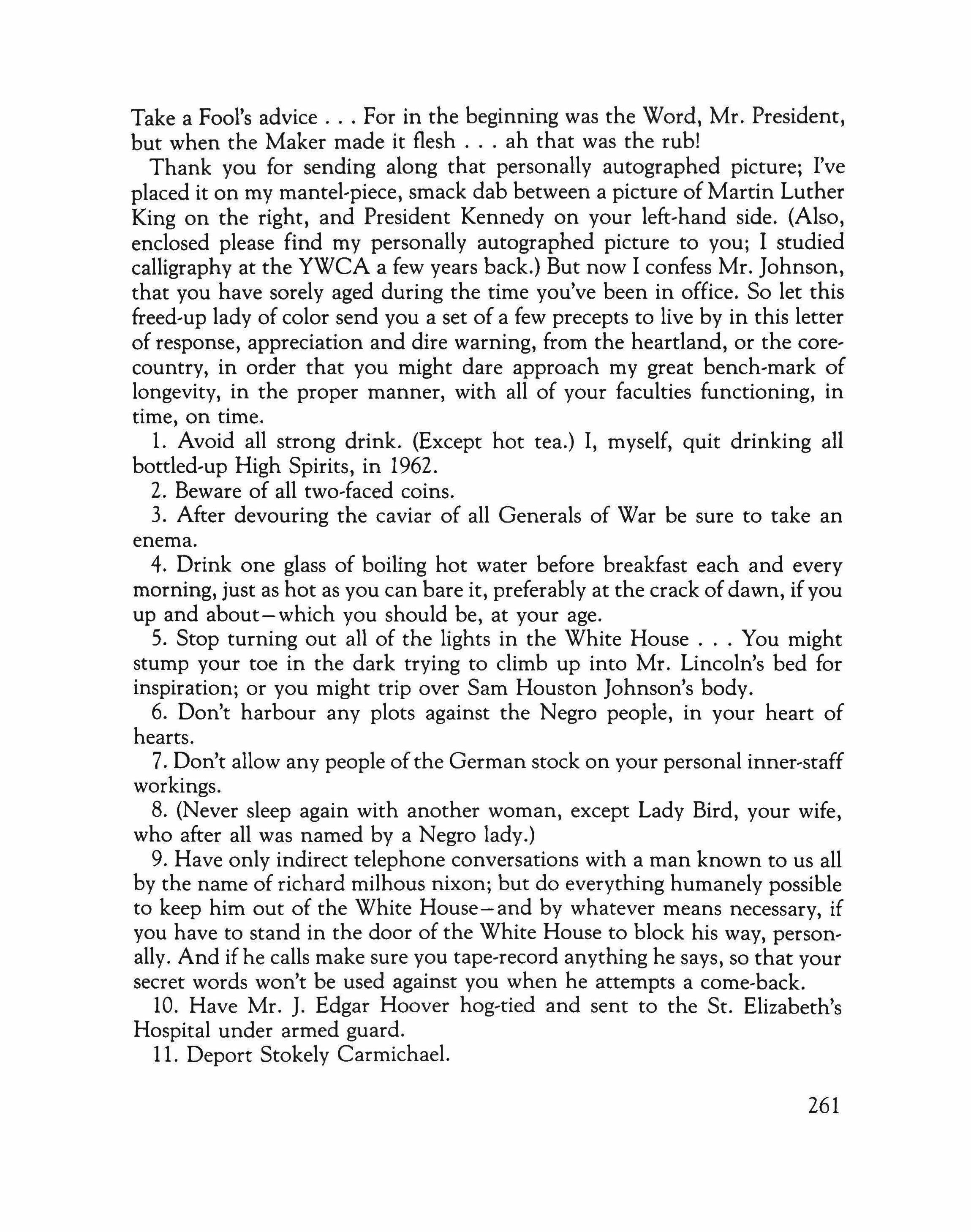
Take a Fool's advice For in the beginning was the Word, Mr. President, but when the Maker made it flesh ah that was the rub!
Thank you for sending along that personally autographed picture; I've placed it on my mantel-piece, smack dab between a picture of Martin Luther King on the right, and President Kennedy on your left,hand side. (Also, enclosed please find my personally autographed picture to you; I studied calligraphy at the YWCA a few years back.) But now I confess Mr. Johnson, that you have sorely aged during the time you've been in office. So let this freed,up lady of color send you a set of a few precepts to live by in this letter of response, appreciation and dire warning, from the heartland, or the core, country, in order that you might dare approach my great bench-mark of longevity, in the proper manner, with all of your faculties functioning, in time, on time.
1. Avoid all strong drink. (Except hot tea.) I, myself, quit drinking all bottled,up High Spirits, in 1962.
2. Beware of all two-faced coins.
3. After devouring the caviar of all Generals of War be sure to take an enema.
4. Drink one glass of boiling hot water before breakfast each and every morning, just as hot as you can bare it, preferably at the crack ofdawn, if you up and about-which you should be, at your age.
5. Stop turning out all of the lights in the White House You might stump your toe in the dark trying to climb up into Mr. Lincoln's bed for inspiration; or you might trip over Sam Houston Johnson's body.
6. Don't harbour any plots against the Negro people, in your heart of hearts.
7. Don't allow any people ofthe German stock on your personal inner-staff workings.
8. (Never sleep again with another woman, except Lady Bird, your wife, who after all was named by a Negro lady.)
9. Have only indirect telephone conversations with a man known to us all by the name of richard milhous nixon; but do everything humanely possible to keep him out of the White House-and by whatever means necessary, if you have to stand in the door of the White House to block his way, person, ally. And if he calls make sure you tape-record anything he says, so that your secret words won't be used against you when he attempts a come-back.
10. Have Mr. J. Edgar Hoover hog-tied and sent to the St. Elizabeth's Hospital under armed guard.
11. Deport Stokely Carmichael.
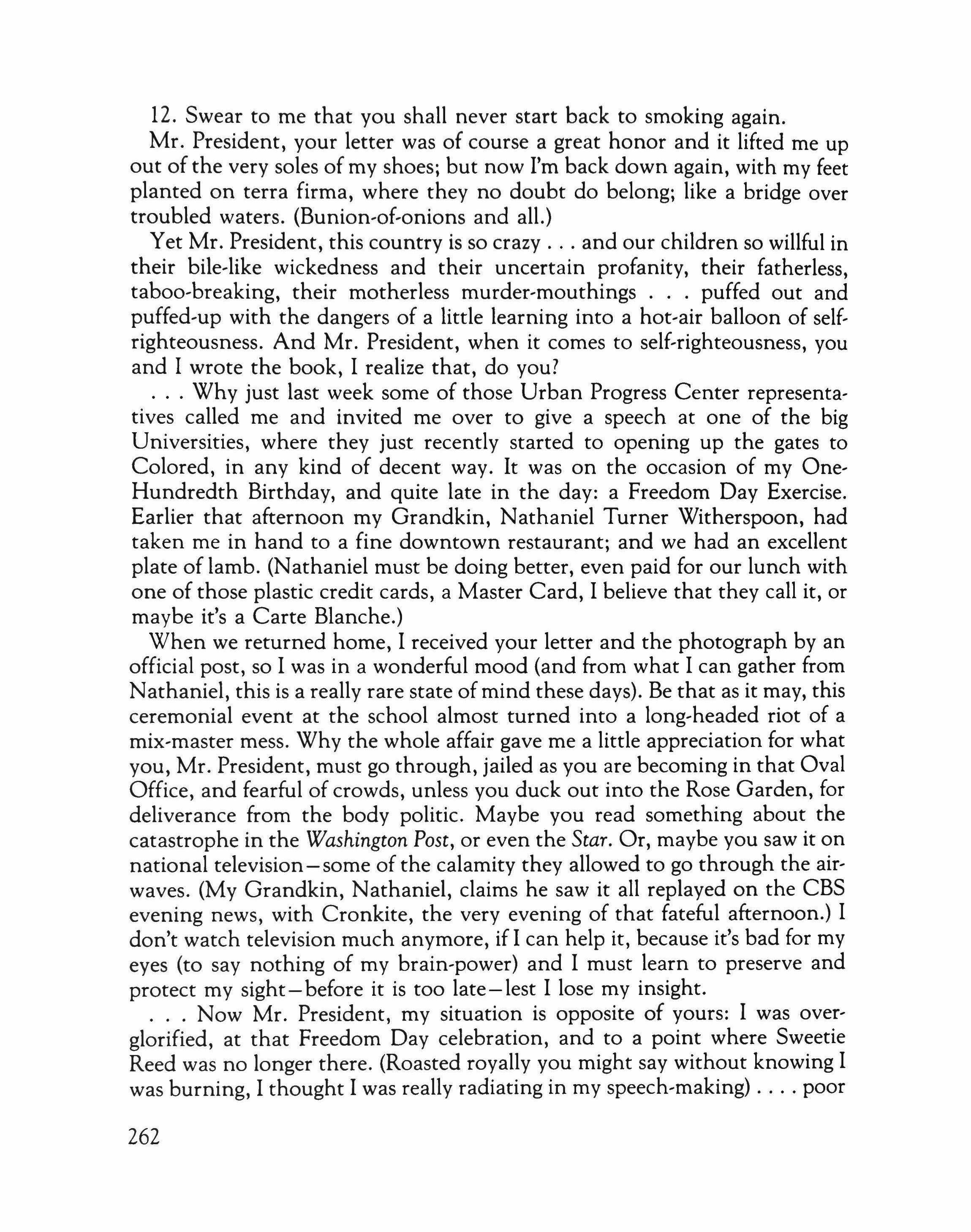
12. Swear to me that you shall never start back to smoking again. Mr. President, your letter was of course a great honor and it lifted me up out of the very soles of my shoes; but now I'm back down again, with my feet planted on terra firma, where they no doubt do belong; like a bridge over troubled waters. (Bunion-of-onions and all.)
Yet Mr. President, this country is so crazy and our children so willful in their bile-like wickedness and their uncertain profanity, their fatherless, taboo-breaking, their motherless murder-rnourhings puffed out and puffed-up with the dangers of a little learning into a hot,air balloon of self, righteousness. And Mr. President, when it comes to self-righteousness, you and I wrote the book, I realize that, do you?
Why just last week some of those Urban Progress Center representatives called me and invited me over to give a speech at one of the big Universities, where they just recently started to opening up the gates to Colored, in any kind of decent way. It was on the occasion of my One, Hundredth Birthday, and quite late in the day: a Freedom Day Exercise. Earlier that afternoon my Grandkin, Nathaniel Turner Witherspoon, had taken me in hand to a fine downtown restaurant; and we had an excellent plate of lamb. (Nathaniel must be doing better, even paid for our lunch with one of those plastic credit cards, a Master Card, I believe that they call it, or maybe it's a Carte Blanche.)
When we returned home, I received your letter and the photograph by an official post, so I was in a wonderful mood (and from what I can gather from Nathaniel, this is a really rare state of mind these days). Be that as it may, this ceremonial event at the school almost turned into a long'headed riot of a mix-master mess. Why the whole affair gave me a little appreciation for what you, Mr. President, must go through, jailed as you are becoming in that Oval Office, and fearful of crowds, unless you duck out into the Rose Garden, for deliverance from the body politic. Maybe you read something about the catastrophe in the Washington Post, or even the Star. Or, maybe you saw it on national television - some of the calamity they allowed to go through the air' waves. (My Grandkin, Nathaniel, claims he saw it all replayed on the CBS evening news, with Cronkite, the very evening of that fateful afternoon.) I don't watch television much anymore, if I can help it, because it's bad for my eyes (to say nothing of my brain-power) and I must learn to preserve and protect my sight - before it is too late-lest I lose my insight Now Mr. President, my situation is opposite of yours: I was over, glorified, at that Freedom Day celebration, and to a point where Sweetie Reed was no longer there. (Roasted royally you might say without knowing I was burning, I thought I was really radiating in my speech-making) poor
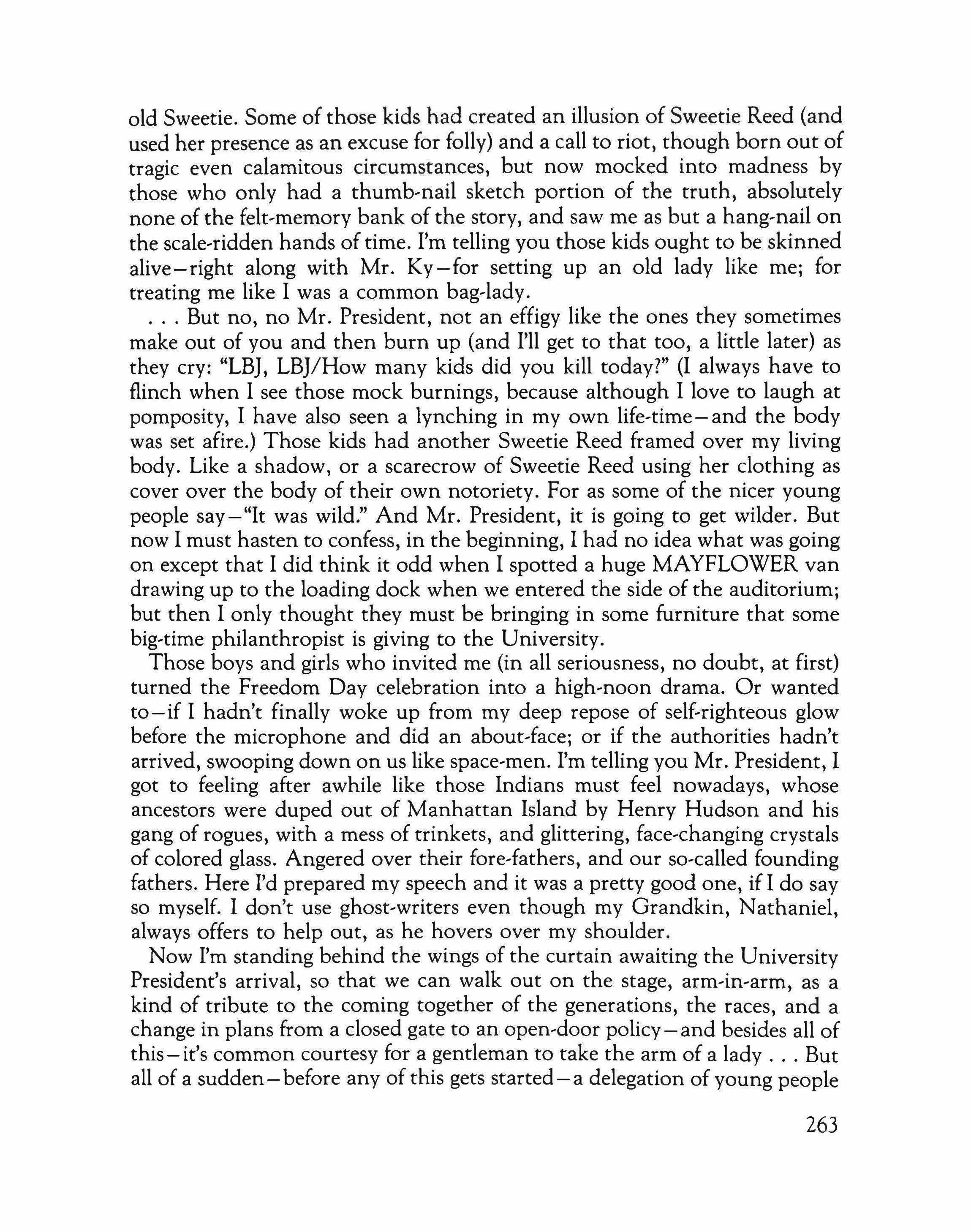
old Sweetie. Some of those kids had created an illusion of Sweetie Reed (and used her presence as an excuse for folly) and a call to riot, though born out of tragic even calamitous circumstances, but now mocked into madness by those who only had a thumb-nail sketch portion of the truth, absolutely none of the felr-memory bank of the story, and saw me as but a hang-nail on the scale-ridden hands of time. I'm telling you those kids ought to be skinned alive-right along with Mr. Ky-for setting up an old lady like me; for treating me like I was a common bag-lady
But no, no Mr. President, not an effigy like the ones they sometimes make out of you and then burn up (and I'll get to that too, a little later) as they cry: "LBJ, LBJ/How many kids did you kill today?" (I always have to flinch when I see those mock burnings, because although I love to laugh at pomposity, I have also seen a lynching in my own life-time= and the body was set afire.) Those kids had another Sweetie Reed framed over my living body. Like a shadow, or a scarecrow of Sweetie Reed using her clothing as cover over the body of their own notoriety. For as some of the nicer young people say-"It was wild." And Mr. President, it is going to get wilder. But now I must hasten to confess, in the beginning, I had no idea what was going on except that I did think it odd when I spotted a huge MAYFLOWER van drawing up to the loading dock when we entered the side of the auditorium; but then I only thought they must be bringing in some furniture that some big-time philanthropist is giving to the University.
Those boys and girls who invited me (in all seriousness, no doubt, at first) turned the Freedom Day celebration into a high-noon drama. Or wanted to-if I hadn't finally woke up from my deep repose of self-righteous glow before the microphone and did an about-face: or if the authorities hadn't arrived, swooping down on us like space-men. I'm telling you Mr. President, I got to feeling after awhile like those Indians must feel nowadays, whose ancestors were duped out of Manhattan Island by Henry Hudson and his gang of rogues, with a mess of trinkets, and glittering, face-changing crystals of colored glass. Angered over their fore-fathers, and our so-called founding fathers. Here I'd prepared my speech and it was a pretty good one, if! do say so myself. I don't use ghost-writers even though my Grandkin, Nathaniel, always offers to help out, as he hovers over my shoulder.
Now I'm standing behind the wings of the curtain awaiting the University President's arrival, so that we can walk out on the stage, arm-in-arm, as a kind of tribute to the coming together of the generations, the races, and a change in plans from a closed gate to an open-door policy - and besides all of this-it's common courtesy for a gentleman to take the arm of a lady But all of a sudden - before any of this gets started - a delegation of young people
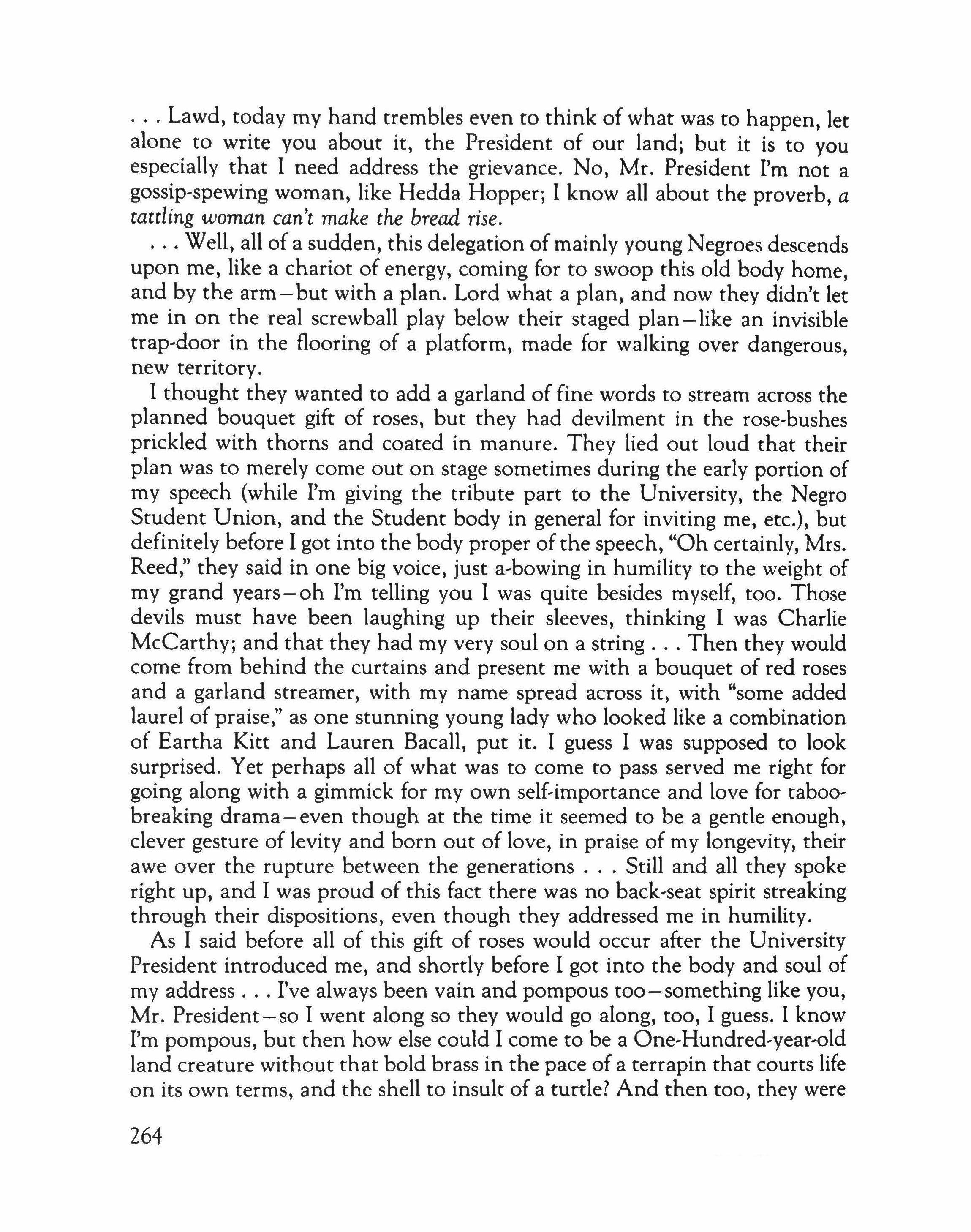
Lawd, today my hand trembles even to think of what was to happen, let alone to write you about it, the President of our land; but it is to you especially that I need address the grievance. No, Mr. President I'm not a gossip-spewing woman, like Hedda Hopper; I know all about the proverb, a tattling woman can't make the bread rise
Well, all of a sudden, this delegation of mainly young Negroes descends upon me, like a chariot of energy, coming for to swoop this old body home, and by the arm - but with a plan. Lord what a plan, and now they didn't let me in on the real screwball play below their staged plan-like an invisible trap-door in the flooring of a platform, made for walking over dangerous, new territory.
I thought they wanted to add a garland of fine words to stream across the planned bouquet gift of roses, but they had devilment in the rose-bushes prickled with thorns and coated in manure. They lied out loud that their plan was to merely come out on stage sometimes during the early portion of my speech {while I'm giving the tribute part to the University, the Negro Student Union, and the Student body in general for inviting me, etc.), but definitely before I got into the body proper of the speech, "Oh certainly, Mrs. Reed," they said in one big voice, just a-bowing in humility to the weight of my grand years-oh I'm telling you I was quite besides myself, too. Those devils must have been laughing up their sleeves, thinking I was Charlie McCarthy; and that they had my very soul on a string Then they would come from behind the curtains and present me with a bouquet of red roses and a garland streamer, with my name spread across it, with "some added laurel of praise," as one stunning young lady who looked like a combination of Eartha Kitt and Lauren Bacall, put it. I guess I was supposed to look surprised. Yet perhaps all of what was to come to pass served me right for going along with a gimmick for my own self-importance and love for taboo, breaking drama - even though at the time it seemed to be a gentle enough, clever gesture of levity and born out of love, in praise of my longevity, their awe over the rupture between the generations Still and all they spoke right up, and I was proud of this fact there was no back-seat spirit streaking through their dispositions, even though they addressed me in humility.
As I said before all of this gift of roses would occur after the University President introduced me, and shortly before I got into the body and soul of my address I've always been vain and pompous too-something like you, Mr. President-so I went along so they would go along, too, I guess. I know I'm pompous, but then how else could I come to be a One-Hundred-year-old land creature without that bold brass in the pace of a terrapin that courts life on its own terms, and the shell to insult of a turtle? And then too, they were
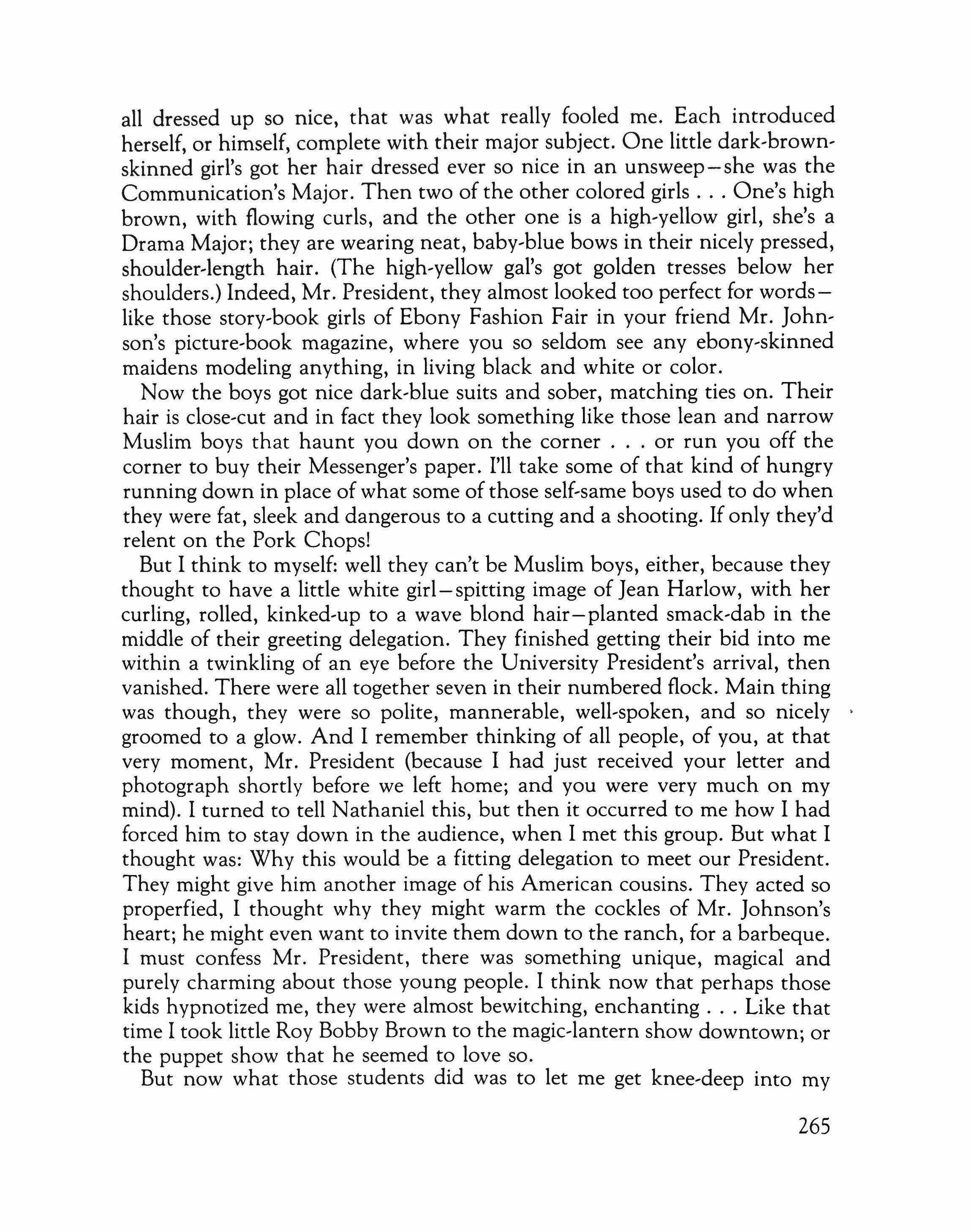
all dressed up so nice, that was what really fooled me. Each introduced herself, or himself, complete with their major subject. One little dark,brown, skinned girl's got her hair dressed ever so nice in an unsweep-she was the Communication's Major. Then two of the other colored girls One's high brown, with flowing curls, and the other one is a high-yellow girl, she's a Drama Major; they are wearing neat, baby-blue bows in their nicely pressed, shoulder-length hair. (The high,yellow gal's got golden tresses below her shoulders.) Indeed, Mr. President, they almost looked too perfect for wordslike those story-book girls of Ebony Fashion Fair in your friend Mr. John, son's picture-book magazine, where you so seldom see any ebony-skinned maidens modeling anything, in living black and white or color.
Now the boys got nice dark-blue suits and sober, matching ties on. Their hair is close-cut and in fact they look something like those lean and narrow Muslim boys that haunt you down on the corner or run you off the corner to buy their Messenger's paper. I'll take some of that kind of hungry running down in place of what some of those self-same boys used to do when they were fat, sleek and dangerous to a cutting and a shooting. If only they'd relent on the Pork Chops!
But I think to myself: well they can't be Muslim boys, either, because they thought to have a little white girl-spitting image of Jean Harlow, with her curling, rolled, kinked-up to a wave blond hair-planted smack-dab in the middle of their greeting delegation. They finished getting their bid into me within a twinkling of an eye before the University President's arrival, then vanished. There were all together seven in their numbered flock. Main thing was though, they were so polite, mannerable, well-spoken, and so nicely groomed to aglow. And I remember thinking of all people, of you, at that very moment, Mr. President (because I had just received your letter and photograph shortly before we left home; and you were very much on my mind). I turned to tell Nathaniel this, but then it occurred to me how I had forced him to stay down in the audience, when I met this group. But what I thought was: Why this would be a fitting delegation to meet our President. They might give him another image of his American cousins. They acted so properfied, I thought why they might warm the cockles of Mr. Johnson's heart; he might even want to invite them down to the ranch, for a barbeque. I must confess Mr. President, there was something unique, magical and purely charming about those young people. I think now that perhaps those kids hypnotized me, they were almost bewitching, enchanting Like that time I took little Roy Bobby Brown to the magic-lantern show downtown; or the puppet show that he seemed to love so.
But now what those students did was to let me get knee-deep into my
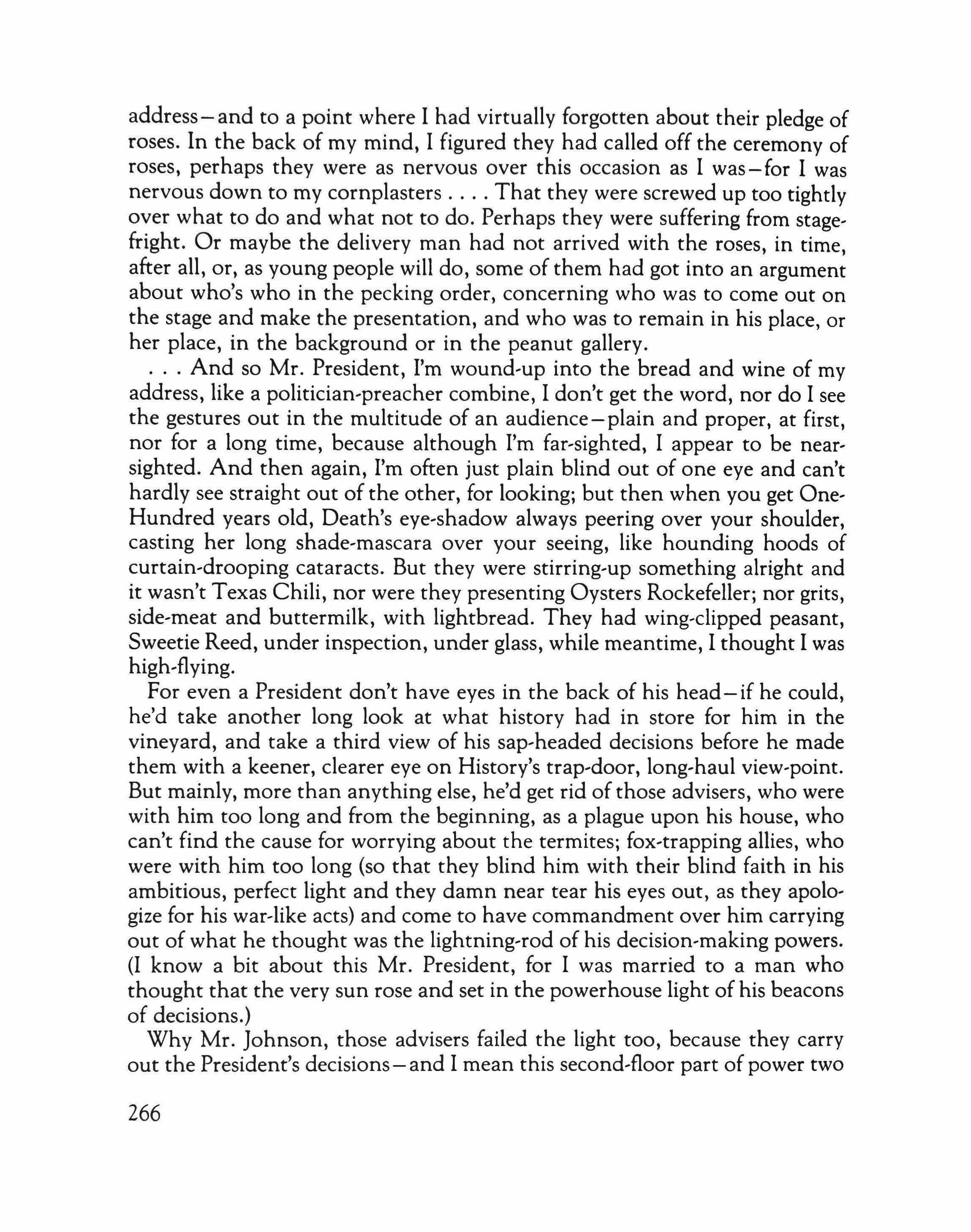
address-and to a point where I had virtually forgotten about their pledge of roses. In the back of my mind, I figured they had called off the ceremony of roses, perhaps they were as nervous over this occasion as I was-for I was nervous down to my cornplasters That they were screwed up too tightly over what to do and what not to do. Perhaps they were suffering from stage, fright. Or maybe the delivery man had not arrived with the roses, in time, after all, or, as young people will do, some of them had got into an argument about who's who in the pecking order, concerning who was to come out on the stage and make the presentation, and who was to remain in his place, or her place, in the background or in the peanut gallery
And so Mr. President, I'm wound-up into the bread and wine of my address, like a politician-preacher combine, I don't get the word, nor do I see the gestures out in the multitude of an audience-plain and proper, at first, nor for a long time, because although I'm far-sighted, I appear to be near, sighted. And then again, I'm often just plain blind out of one eye and can't hardly see straight out of the other, for looking; but then when you get One, Hundred years old, Death's eve-shadow always peering over your shoulder, casting her long shade-mascara over your seeing, like hounding hoods of curtain-drooping cataracts. But they were stirring-up something alright and it wasn't Texas Chili, nor were they presenting Oysters Rockefeller; nor grits, side-meat and buttermilk, with lightbread. They had wing-clipped peasant, Sweetie Reed, under inspection, under glass, while meantime, I thought I was high-flying.
For even a President don't have eyes in the back of his head - if he could, he'd take another long look at what history had in store for him in the vineyard, and take a third view of his sap-headed decisions before he made them with a keener, clearer eye on History's trap-door, long-haul view-point. But mainly, more than anything else, he'd get rid of those advisers, who were with him too long and from the beginning, as a plague upon his house, who can't find the cause for worrying about the termites; fox-trapping allies, who were with him too long (so that they blind him with their blind faith in his ambitious, perfect light and they damn near tear his eyes out, as they apologize for his war-like acts) and come to have commandment over him carrying out of what he thought was the lightning-rod of his decision-making powers. (I know a bit about this Mr. President, for I was married to a man who thought that the very sun rose and set in the powerhouse light of his beacons of decisions.)
Why Mr. Johnson, those advisers failed the light too, because they carry out the President's decisions-and I mean this second-floor part of power two
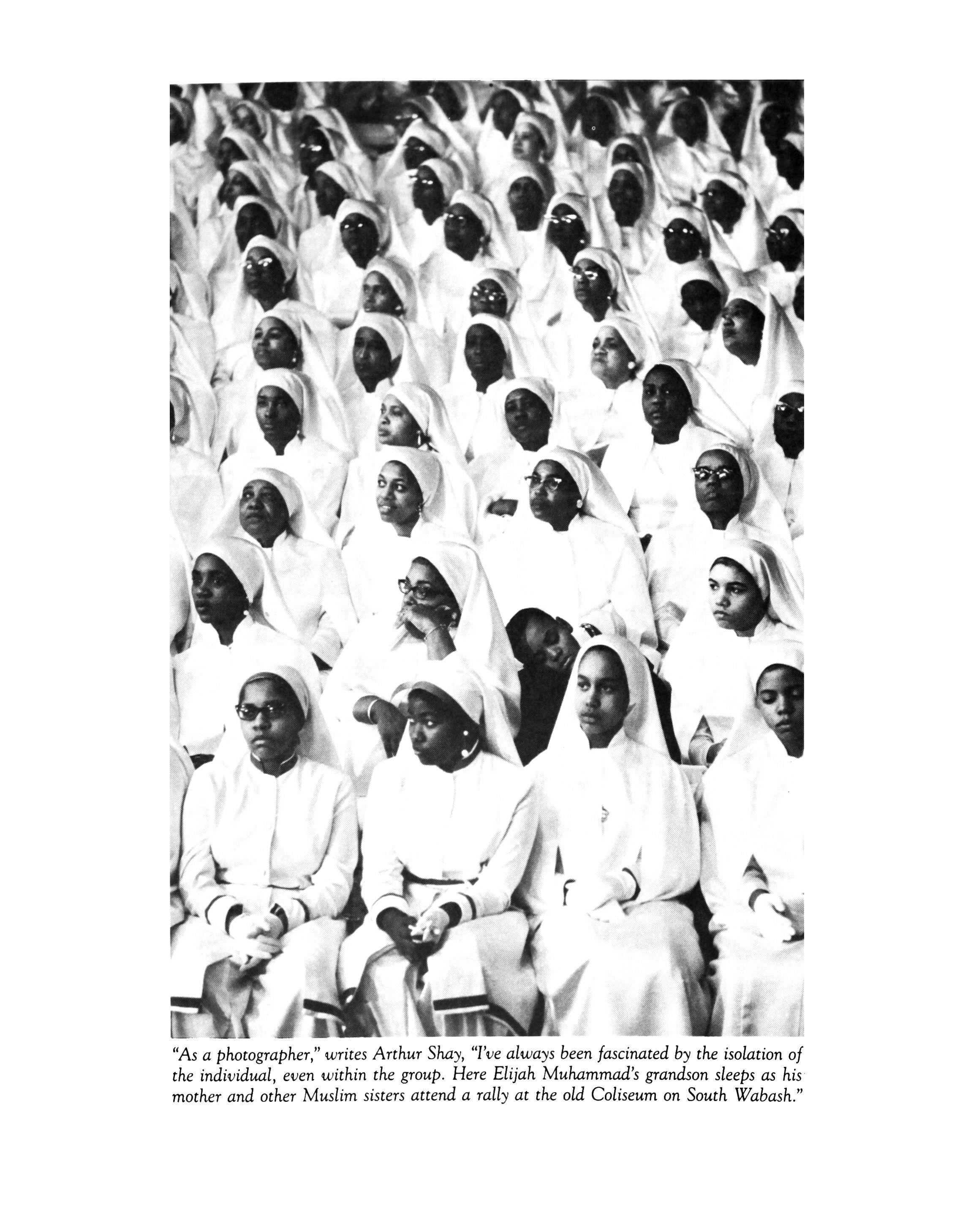
"As a photographer," writes Arthur Shay, "I've always been fascinated by the isolation of the individual, even within the group. Here Elijah Muhammad's grandson sleeps as his mother and other Muslim sisters attend a rally at the old Coliseum on South Wabash."
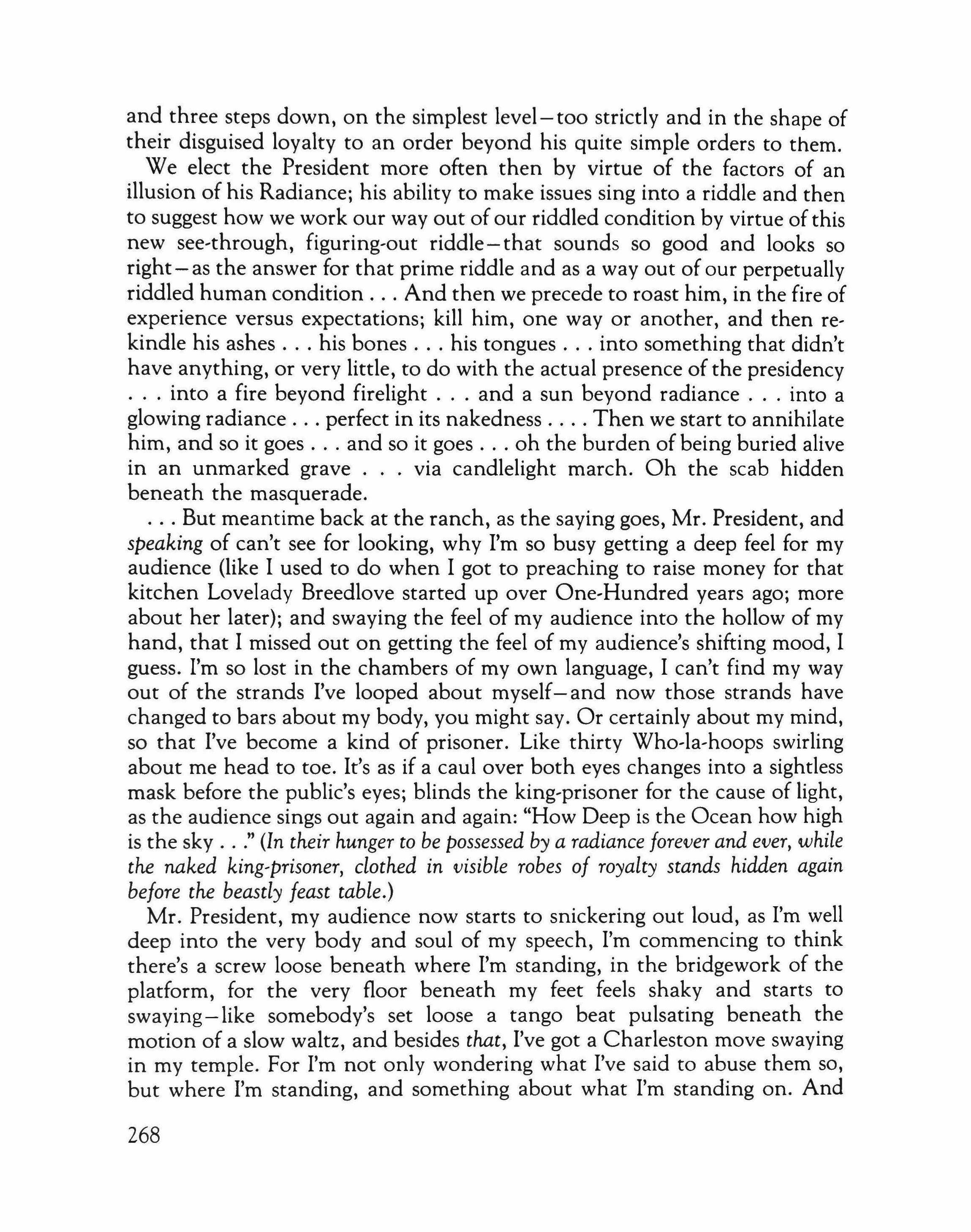
and three steps down, on the simplest level-too strictly and in the shape of their disguised loyalty to an order beyond his quite simple orders to them.
We elect the President more often then by virtue of the factors of an illusion of his Radiance; his ability to make issues sing into a riddle and then to suggest how we work our way out of our riddled condition by virtue ofthis new see-through, figuring-out riddle-that sounds so good and looks so right - as the answer for that prime riddle and as a way out of our perpetually riddled human condition And then we precede to roast him, in the fire of experience versus expectations; kill him, one way or another, and then rekindle his ashes his bones his tongues into something that didn't have anything, or very little, to do with the actual presence of the presidency into a fire beyond firelight and a sun beyond radiance into a glowing radiance perfect in its nakedness Then we start to annihilate him, and so it goes and so it goes oh the burden of being buried alive in an unmarked grave via candlelight march. Oh the scab hidden beneath the masquerade
But meantime back at the ranch, as the saying goes, Mr. President, and speaking of can't see for looking, why I'm so busy getting a deep feel for my audience (like I used to do when I got to preaching to raise money for that kitchen Lovelady Breedlove started up over One-Hundred years ago; more about her later); and swaying the feel of my audience into the hollow of my hand, that I missed out on getting the feel of my audience's shifting mood, I guess. I'm so lost in the chambers of my own language, I can't find my way out of the strands I've looped about myself-and now those strands have changed to bars about my body, you might say. Or certainly about my mind, so that I've become a kind of prisoner. Like thirty Who�la�hoops swirling about me head to toe. It's as if a caul over both eyes changes into a sightless mask before the public's eyes; blinds the king-prisoner for the cause of light, as the audience sings out again and again: "How Deep is the Ocean how high is the sky " (In their hunger to be possessed by a radiance forever and ever, while the naked king-pruoner, clothed in visible robes of royalty stands hidden again before the beastly feast table.)
Mr. President, my audience now starts to snickering out loud, as I'm well deep into the very body and soul of my speech, I'm commencing to think there's a screw loose beneath where I'm standing, in the bridgework of the platform, for the very floor beneath my feet feels shaky and starts to swaying-like somebody's set loose a tango beat pulsating beneath the motion of a slow waltz, and besides that, I've got a Charleston move swaying in my temple. For I'm not only wondering what I've said to abuse them so, but where I'm standing, and something about what I'm standing on. And
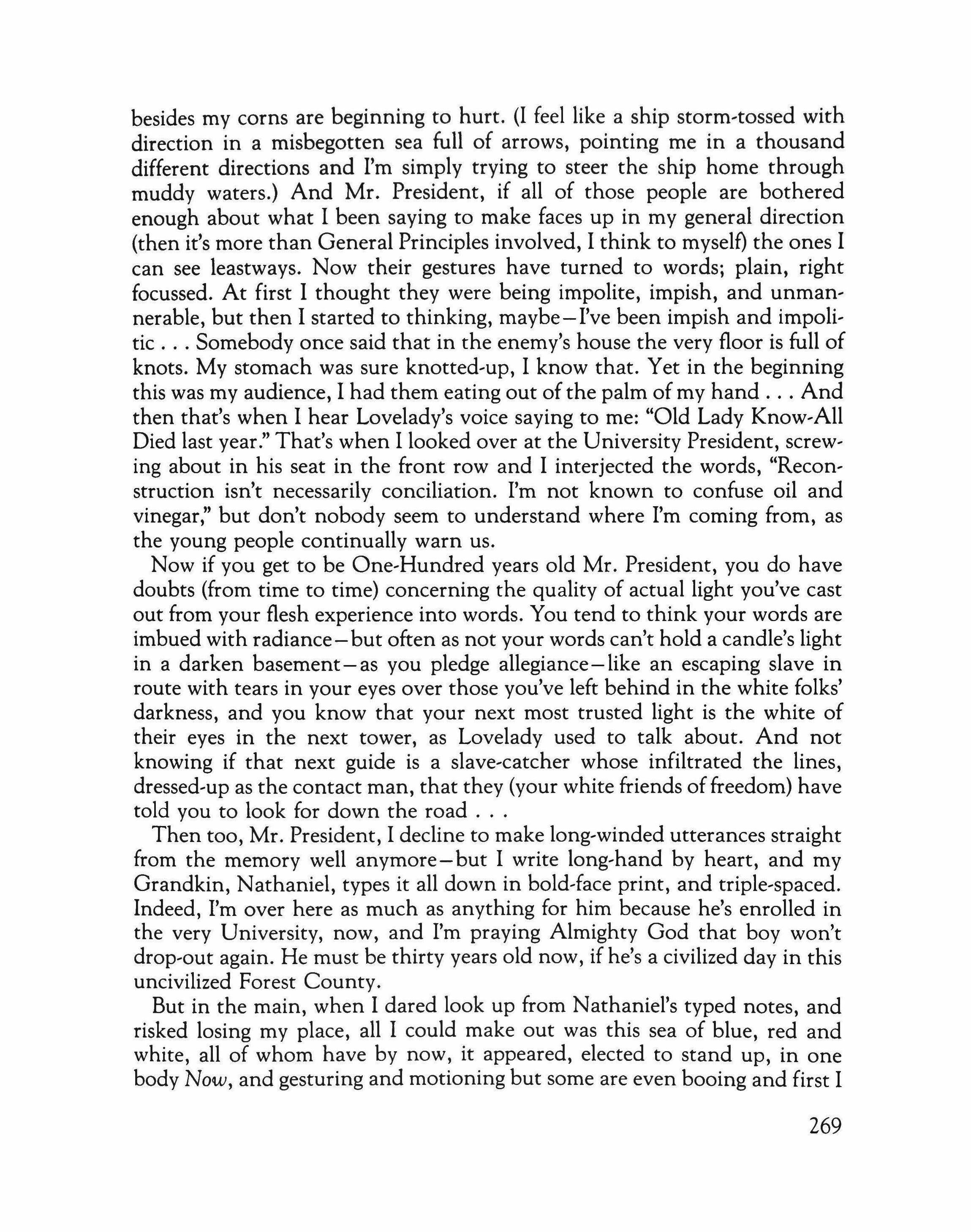
besides my corns are beginning to hurt. (I feel like a ship storm-tossed with direction in a misbegotten sea full of arrows, pointing me in a thousand different directions and I'm simply trying to steer the ship home through muddy waters.) And Mr. President, if all of those people are bothered enough about what I been saying to make faces up in my general direction (then it's more than General Principles involved, I think to myself) the ones 1 can see leastways. Now their gestures have turned to words; plain, right focussed. At first I thought they were being impolite, impish, and unman' nerable, but then I started to thinking, maybe-I've been impish and impolitic Somebody once said that in the enemy's house the very floor is full of knots. My stomach was sure knotted-up, I know that. Yet in the beginning this was my audience, I had them eating out ofthe palm of my hand And then that's when I hear Lovelady's voice saying to me: "Old Lady Know-All Died last year." That's when I looked over at the University President, screw, ing about in his seat in the front row and I interjected the words, "Reconstruction isn't necessarily conciliation. I'm not known to confuse oil and vinegar," but don't nobody seem to understand where I'm coming from, as the young people continually warn us.
Now if you get to be One-Hundred years old Mr. President, you do have doubts (from time to time) concerning the quality of actual light you've cast out from your flesh experience into words. You tend to think your words are imbued with radiance-but often as not your words can't hold a candle's light in a darken basement-as you pledge allegiance-like an escaping slave in route with tears in your eyes over those you've left behind in the white folks' darkness, and you know that your next most trusted light is the white of their eyes in the next tower, as Lovelady used to talk about. And not knowing if that next guide is a slave-catcher whose infiltrated the lines, dressed,up as the contact man, that they (your white friends offreedom) have told you to look for down the road
Then too, Mr. President, I decline to make long-winded utterances straight from the memory well anymore-but I write long-hand by heart, and my Grandkin, Nathaniel, types it all down in bold-face print, and triple-spaced. Indeed, I'm over here as much as anything for him because he's enrolled in the very University, now, and I'm praying Almighty God that boy won't drop-out again. He must be thirty years old now, if he's a civilized day in this uncivilized Forest County.
But in the main, when I dared look up from Nathaniel's typed notes, and risked losing my place, all I could make out was this sea of blue, red and white, all of whom have by now, it appeared, elected to stand up, in one body Now, and gesturing and motioning but some are even booing and first I
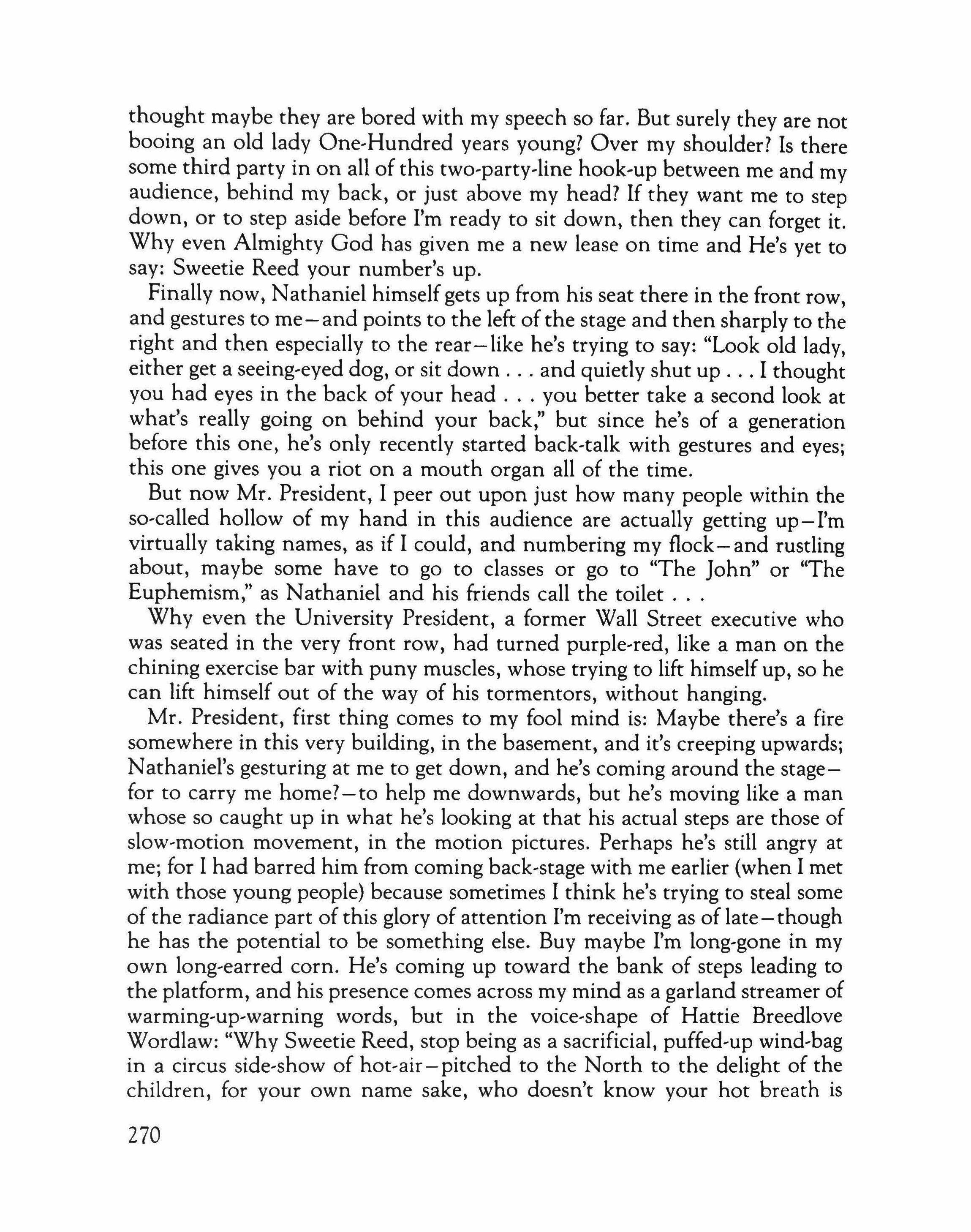
thought maybe they are bored with my speech so far. But surely they are not booing an old lady One-Hundred years young? Over my shoulder? Is there some third party in on all of this two-party-line hook-up between me and my audience, behind my back, or just above my head? If they want me to step down, or to step aside before I'm ready to sit down, then they can forget it. Why even Almighty God has given me a new lease on time and He's yet to say: Sweetie Reed your number's up.
Finally now, Nathaniel himself gets up from his seat there in the front row, and gestures to me-and points to the left of the stage and then sharply to the right and then especially to the rear-like he's trying to say: "Look old lady, either get a seeing-eyed dog, or sit down and quietly shut up I thought you had eyes in the back of your head you better take a second look at what's really going on behind your back," but since he's of a generation before this one, he's only recently started back-talk with gestures and eyes; this one gives you a riot on a mouth organ all of the time.
But now Mr. President, I peer out upon just how many people within the so-called hollow of my hand in this audience are actually getting up-I'm virtually taking names, as if I could, and numbering my flock-and rustling about, maybe some have to go to classes or go to "The John" or "The Euphemism," as Nathaniel and his friends call the toilet
Why even the University President, a former Wall Street executive who was seated in the very front row, had turned purple-red, like a man on the chining exercise bar with puny muscles, whose trying to lift himself up, so he can lift himself out of the way of his tormentors, without hanging.
Mr. President, first thing comes to my fool mind is: Maybe there's a fire somewhere in this very building, in the basement, and it's creeping upwards; Nathaniel's gesturing at me to get down, and he's coming around the stagefor to carry me home? - to help me downwards, but he's moving like a man whose so caught up in what he's looking at that his actual steps are those of slow-motion movement, in the motion pictures. Perhaps he's still angry at me; for I had barred him from coming back-stage with me earlier (when I met with those young people) because sometimes I think he's trying to steal some of the radiance part of this glory of attention I'm receiving as of late-though he has the potential to be something else. Buy maybe I'm long-gone in my own long-earred corn. He's coming up toward the bank of steps leading to the platform, and his presence comes across my mind as a garland streamer of warming-up-warning words, but in the voice-shape of Hattie Breedlove Wordlaw: "Why Sweetie Reed, stop being as a sacrificial, puffed-up wind-bag in a circus side-show of hot-air=pitched to the North to the delight of the children, for your own name sake, who doesn't know your hot breath is
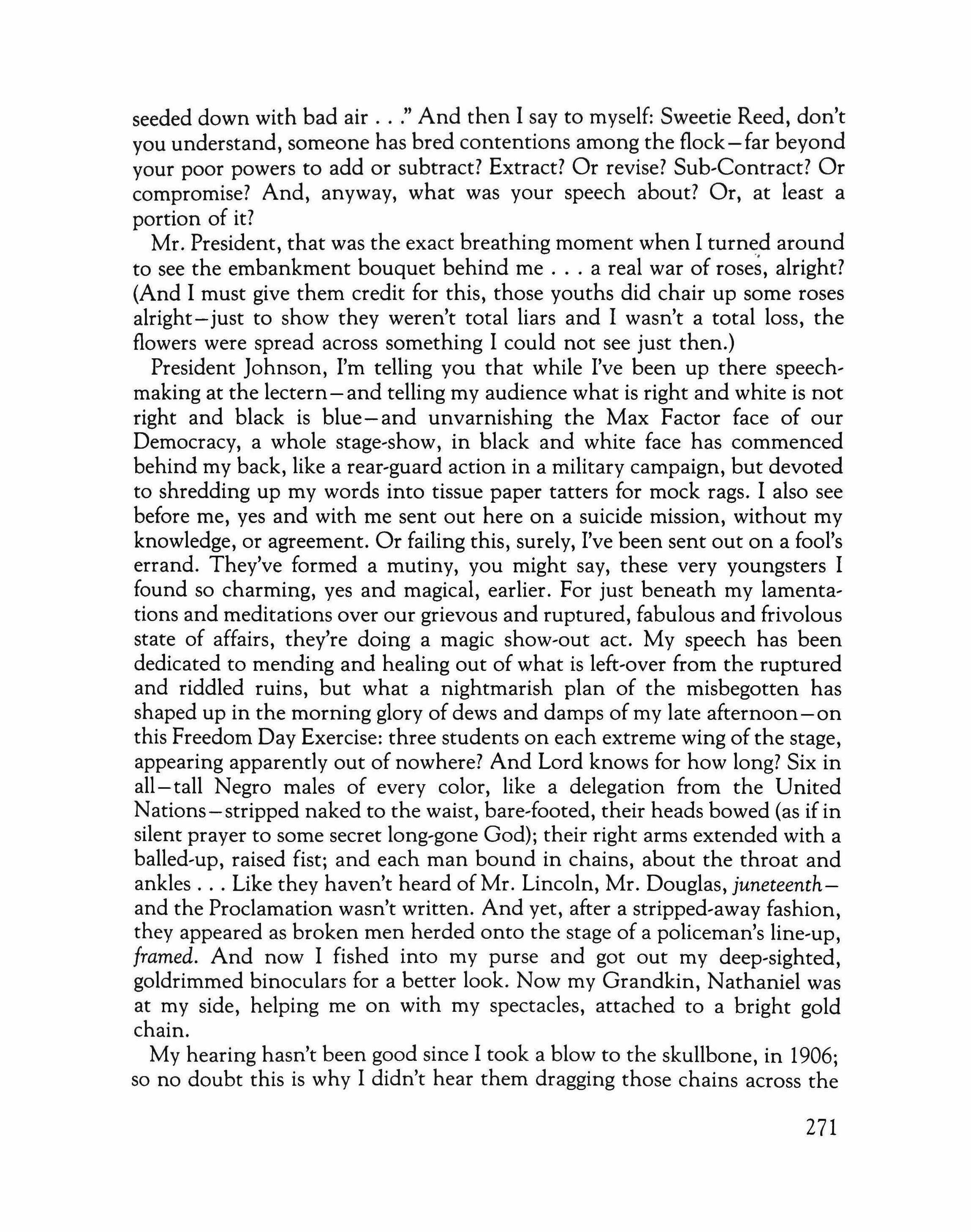
seeded down with bad air And then I say to myself: Sweetie Reed, don't you understand, someone has bred contentions among the flock - far beyond your poor powers to add or subtract? Extract? Or revise? Sub-Contract? Or compromise? And, anyway, what was your speech about? Or, at least a portion of it?
Mr. President, that was the exact breathing moment when I turned around to see the embankment bouquet behind me a real war of roses, alright? (And I must give them credit for this, those youths did chair up some roses alright - just to show they weren't total liars and I wasn't a total loss, the flowers were spread across something I could not see just then.)
President Johnson, I'm telling you that while I've been up there speech, making at the lectern - and telling my audience what is right and white is not right and black is blue-and unvarnishing the Max Factor face of our Democracy, a whole stage-show, in black and white face has commenced behind my back, like a rear-guard action in a military campaign, but devoted to shredding up my words into tissue paper tatters for mock rags. I also see before me, yes and with me sent out here on a suicide mission, without my knowledge, or agreement. Or failing this, surely, I've been sent out on a fool's errand. They've formed a mutiny, you might say, these very youngsters I found so charming, yes and magical, earlier. For just beneath my lamenta' tions and meditations over our grievous and ruptured, fabulous and frivolous state of affairs, they're doing a magic show-out act. My speech has been dedicated to mending and healing out of what is left-over from the ruptured and riddled ruins, but what a nightmarish plan of the misbegotten has shaped up in the morning glory of dews and damps of my late afternoon-on this Freedom Day Exercise: three students on each extreme wing of the stage, appearing apparently out of nowhere? And Lord knows for how long? Six in all-tall Negro males of every color, like a delegation from the United Nations-stripped naked to the waist, bare-footed, their heads bowed (as if in silent prayer to some secret long-gone God); their right arms extended with a balled-up, raised fist; and each man bound in chains, about the throat and ankles Like they haven't heard of Mr. Lincoln, Mr. Douglas, juneteenthand the Proclamation wasn't written. And yet, after a stripped-away fashion, they appeared as broken men herded onto the stage of a policeman's line-up, framed. And now I fished into my purse and got out my deep-sighted, goldrimmed binoculars for a better look. Now my Grandkin, Nathaniel was at my side, helping me on with my spectacles, attached to a bright gold chain.
My hearing hasn't been good since I took a blow to the skullbone, in 1906; so no doubt this is why I didn't hear them dragging those chains across the
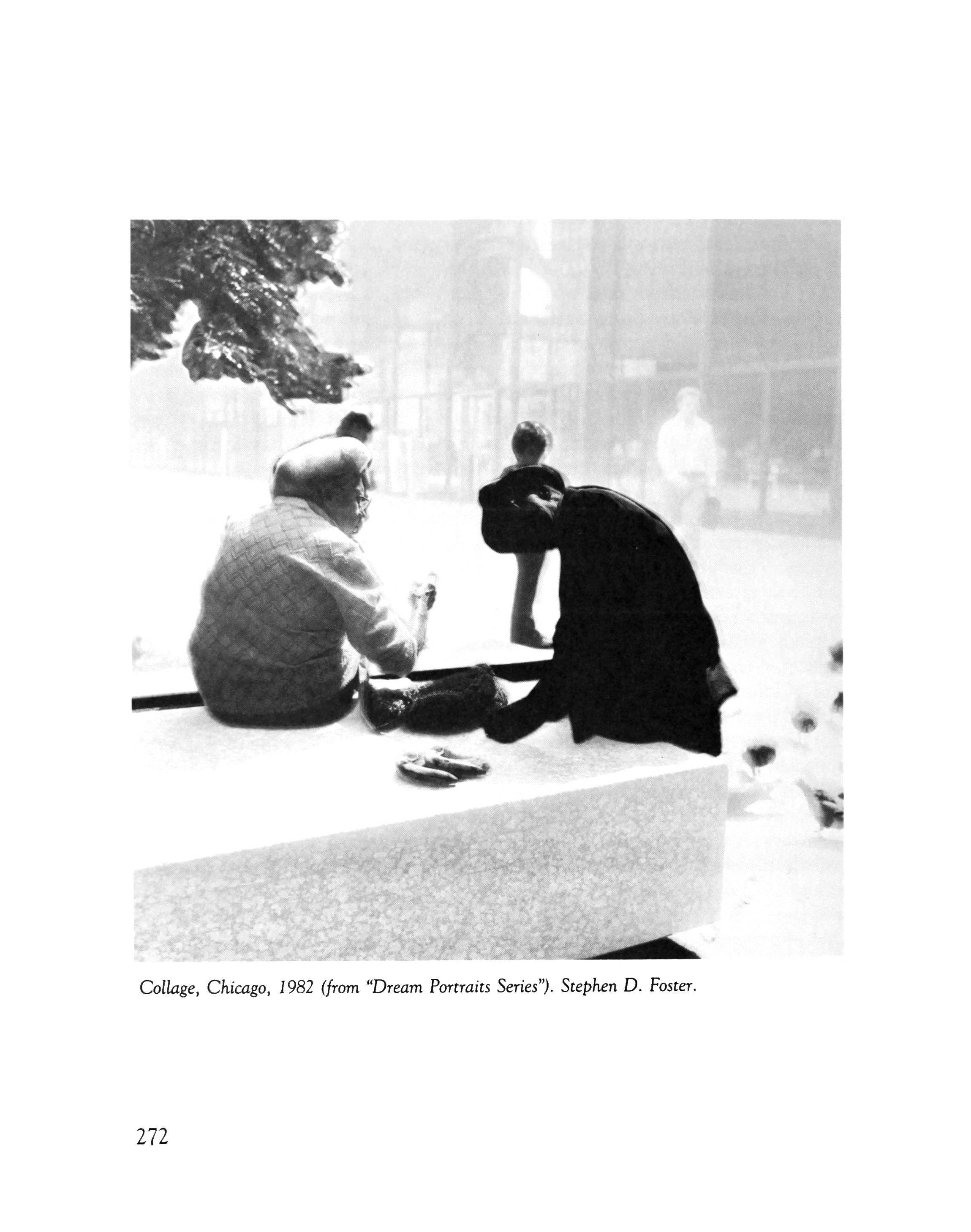

stage, when all of this commotion commenced in silence, like a dance in gestures, beyond words, that is an imitation of a most violent action. That is right, Mr. President, stripped of their garments to the waist, but one of their number is down to his very loin-cloth, lord his bee-bee'ds, you might say, and all fettered in chains. Then I looked again and to my beholding eyes it was a handsome, drearny-eved, young man, whom I had met on the March to Washington, on the train, in 1963. That boy looked the spitting image of Cassius Clay. Lord! But what happened to him, in less than four short years?
And when I looked again, he's got so many chains on it appears as if he's dressed up in chains, and naked without them. Yet hard as I can recollect, I could not remember that boy's name rightful, proper; I kept on calling him out of his name, even though we talked a long-time on that train down to Washington but I do remember him saying over and over again something about "For comrades must not ever be confused with confederates."
Some of the others in their troupe, in the rear-forming an audience unto themselves-and holding up placards with the words: Law and Order; the letters in bold print and shaped out in script of chain-like links. But that is not all. That is only the commencement of the beginning of the ending, and behind my back. I sure wasn't lying when I said, I couldn't see for looking, even with these gold-rim, especially-made lenses.
For smack-dab in the middle of the stage center were some of those white boys with that long hair, like long ears of corn, and they are doing a pantomime of a slave auction, in the middle of the stage, with that little highyellow gal smack-dab in their midst. Kneeling like she's being anointed by the accursed; and pleading for pity But now her head is shorn ofthose golden locks - her wig ofgold is draped over the first step of the mock auction bloc. I was fit to be tied. This plainly wasn't in the plan. (Why I had gotten so cocky, at one point in my speech, feeling that those kids were shelling me about the roses, and that they were really stalking horses for Ralph Edwards' troupe, and half way expecting Mr. Edwards himself to take the stage and take me over, proclaiming my One-Hundredth anniversary of living-amongst the spiritually dead land-on This is Your Life, Sweetie Reed.) Not This! This plainly wasn't in my understanding of the plan. All of this has been going on since before I knew when. But now they don't seem to notice-nor care-that even I've turned to them to bear witness now. Just going on right ahead with the planned-out stage of their silent and solemn ceremony, cocky in their peacefulness. I now asked Nathaniel to fish in my purse and extract my vial of smelling salts And yet Mr. President what you have to see through all ofthese foul and fair and foully feathered deeds reported here too is this: that we sooner work with what we got incubating then over-throw and destroy in
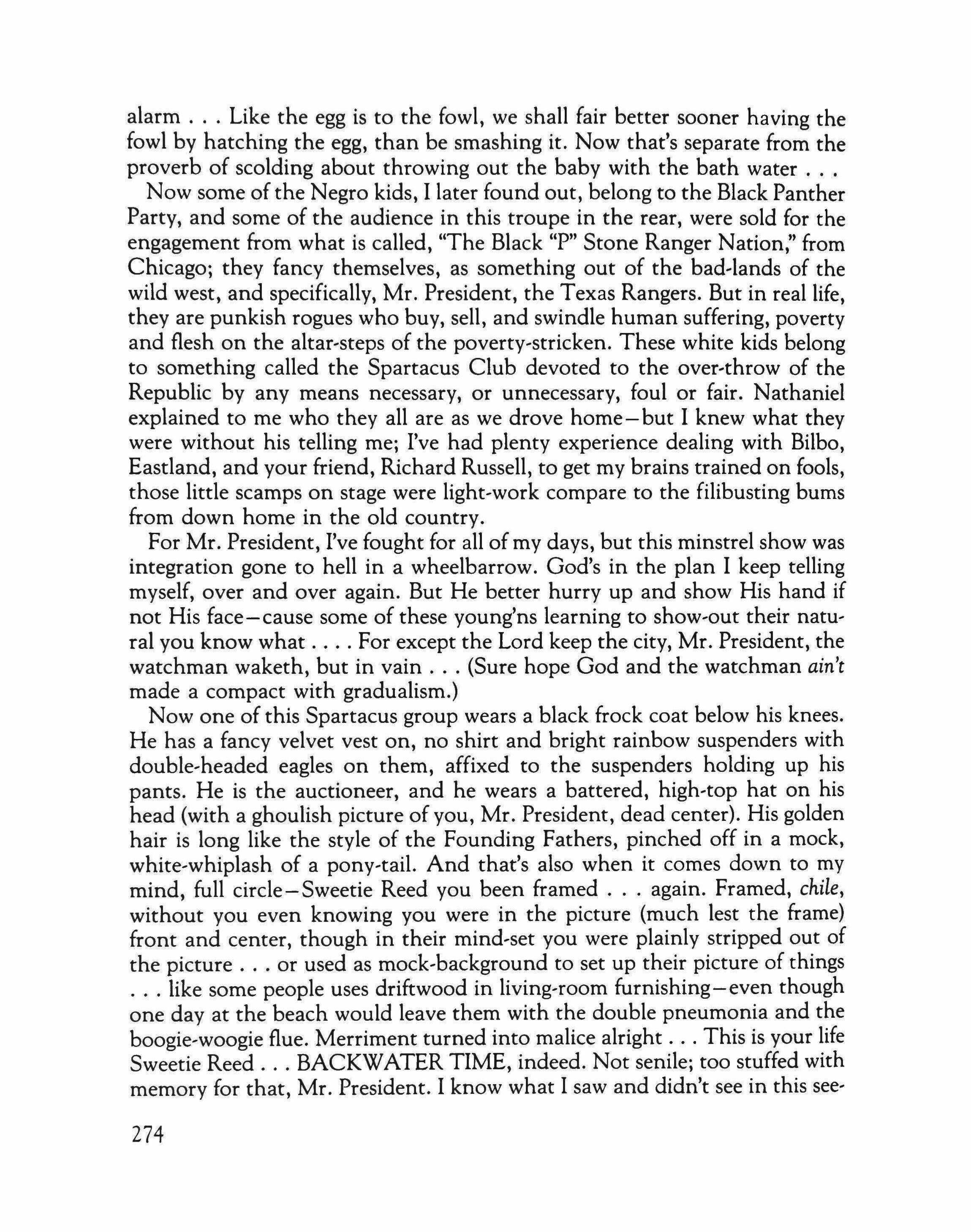
alarm Like the egg is to the fowl, we shall fair better sooner having the fowl by hatching the egg, than be smashing it. Now that's separate from the proverb of scolding about throwing out the baby with the bath water
Now some of the Negro kids, I later found out, belong to the Black Panther Party, and some of the audience in this troupe in the rear, were sold for the engagement from what is called, "The Black "P" Stone Ranger Nation," from Chicago; they fancy themselves, as something out of the bad-lands of the wild west, and specifically, Mr. President, the Texas Rangers. But in real life, they are punkish rogues who buy, sell, and swindle human suffering, poverty and flesh on the altar-steps of the poverty-stricken. These white kids belong to something called the Spartacus Club devoted to the over-throw of the Republic by any means necessary, or unnecessary, foul or fair. Nathaniel explained to me who they all are as we drove home-but I knew what they were without his telling me; I've had plenty experience dealing with Bilbo, Eastland, and your friend, Richard Russell, to get my brains trained on fools, those little scamps on stage were light-work compare to the filibusting bums from down home in the old country.
For Mr. President, I've fought for all of my days, but this minstrel show was integration gone to hell in a wheelbarrow. God's in the plan I keep telling myself, over and over again. But He better hurry up and show His hand if not His face-cause some of these young'ns learning to show-out their natural you know what For except the Lord keep the city, Mr. President, the watchman waketh, but in vain (Sure hope God and the watchman ain't made a compact with gradualism.)
Now one of this Spartacus group wears a black frock coat below his knees. He has a fancy velvet vest on, no shirt and bright rainbow suspenders with double-headed eagles on them, affixed to the suspenders holding up his pants. He is the auctioneer, and he wears a battered, high-top hat on his head (with a ghoulish picture of you, Mr. President, dead center). His golden hair is long like the style of the Founding Fathers, pinched off in a mock, white-whiplash of a pony-tail. And that's also when it comes down to my mind, full circle-Sweetie Reed you been framed again. Framed, chile, without you even knowing you were in the picture (much lest the frame) front and center, though in their mind-set you were plainly stripped out of the picture or used as mock-background to set up their picture of things like some people uses driftwood in living-room furnishing-even though one day at the beach would leave them with the double pneumonia and the boogie-woogie flue. Merriment turned into malice alright This is your life Sweetie Reed BACKWATER TIME, indeed. Not senile; too stuffed with memory for that, Mr. President. I know what I saw and didn't see in this see-
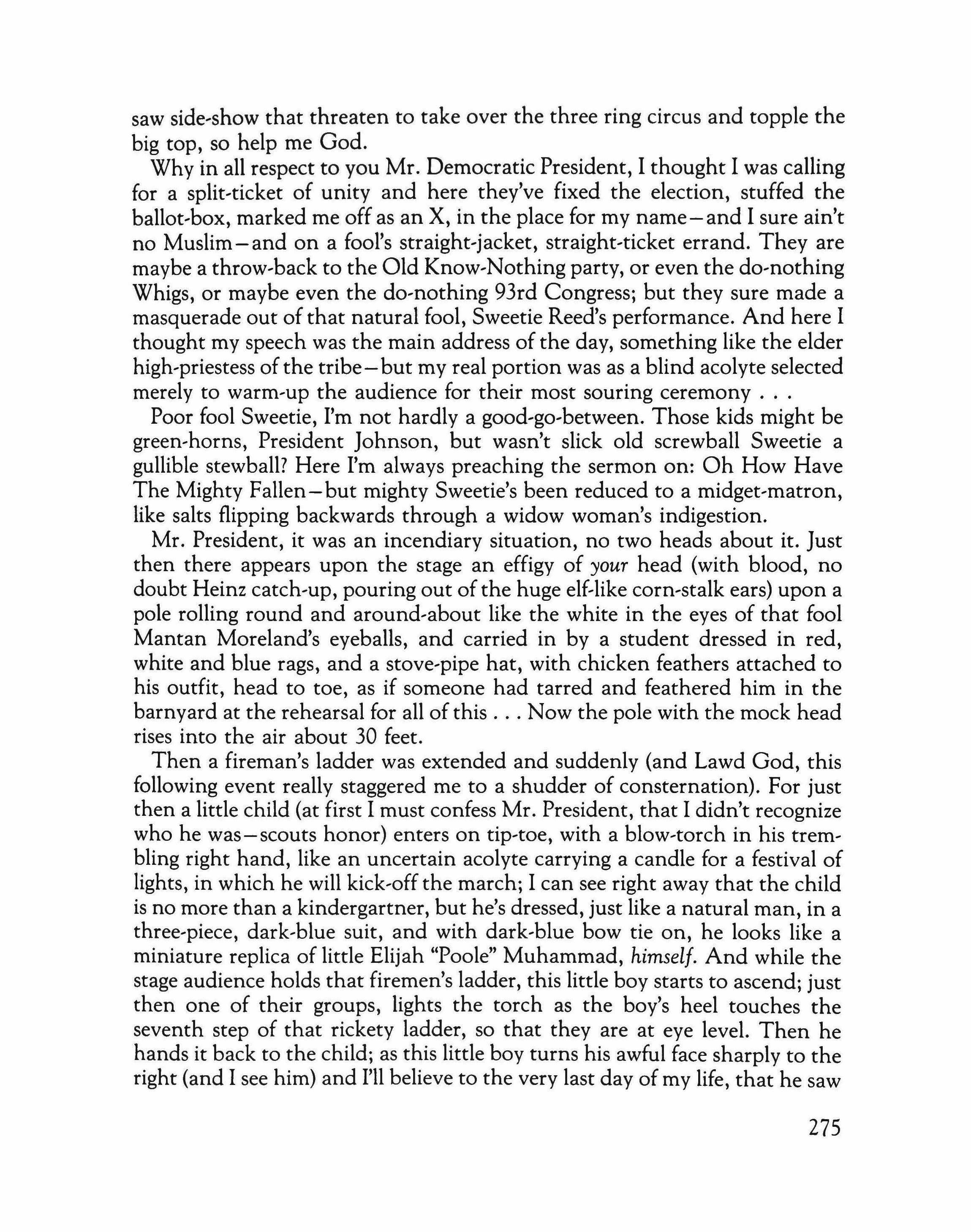
saw side-show that threaten to take over the three ring circus and topple the big top, so help me God.
Why in all respect to you Mr. Democratic President, I thought I was calling for a split,ticket of unity and here they've fixed the election, stuffed the ballot-box, marked me off as an X, in the place for my name-and I sure ain't no Muslim - and on a fool's straight-jacket, straight-ticket errand. They are maybe a throw-back to the Old Know-Nothing party, or even the do-nothing Whigs, or maybe even the do-nothing 93rd Congress; but they sure made a masquerade out of that natural fool, Sweetie Reed's performance. And here I thought my speech was the main address of the day, something like the elder high-priestess ofthe tribe-but my real portion was as a blind acolyte selected merely to warm-up the audience for their most souring ceremony
Poor fool Sweetie, I'm not hardly a good-go-between. Those kids might be green-horns, President Johnson, but wasn't slick old screwball Sweetie a gullible stewball? Here I'm always preaching the sermon on: Oh How Have The Mighty Fallen-but mighty Sweetie's been reduced to a midget-matron, like salts flipping backwards through a widow woman's indigestion.
Mr. President, it was an incendiary situation, no two heads about it. Just then there appears upon the stage an effigy of your head (with blood, no doubt Heinz catch-up, pouring out ofthe huge elf,like corn-stalk ears) upon a pole rolling round and around-about like the white in the eyes of that fool Mantan Moreland's eyeballs, and carried in by a student dressed in red, white and blue rags, and a stove-pipe hat, with chicken feathers attached to his outfit, head to toe, as if someone had tarred and feathered him in the barnyard at the rehearsal for all of this Now the pole with the mock head rises into the air about 30 feet.
Then a fireman's ladder was extended and suddenly (and Lawd God, this following event really staggered me to a shudder of consternation). For just then a little child (at first I must confess Mr. President, that I didn't recognize who he was-scouts honor) enters on tip-toe, with a blow-torch in his trembling right hand, like an uncertain acolyte carrying a candle for a festival of lights, in which he will kick-off the march; I can see right away that the child is no more than a kindergartner, but he's dressed, just like a natural man, in a three-piece, dark-blue suit, and with dark-blue bow tie on, he looks like a miniature replica of little Elijah "Poole" Muhammad, himself. And while the stage audience holds that firemen's ladder, this little boy starts to ascend; just then one of their groups, lights the torch as the boy's heel touches the seventh step of that rickety ladder, so that they are at eye level. Then he hands it back to the child; as this little boy turns his awful face sharply to the right (and I see him) and I'll believe to the very last day of my life, that he saw
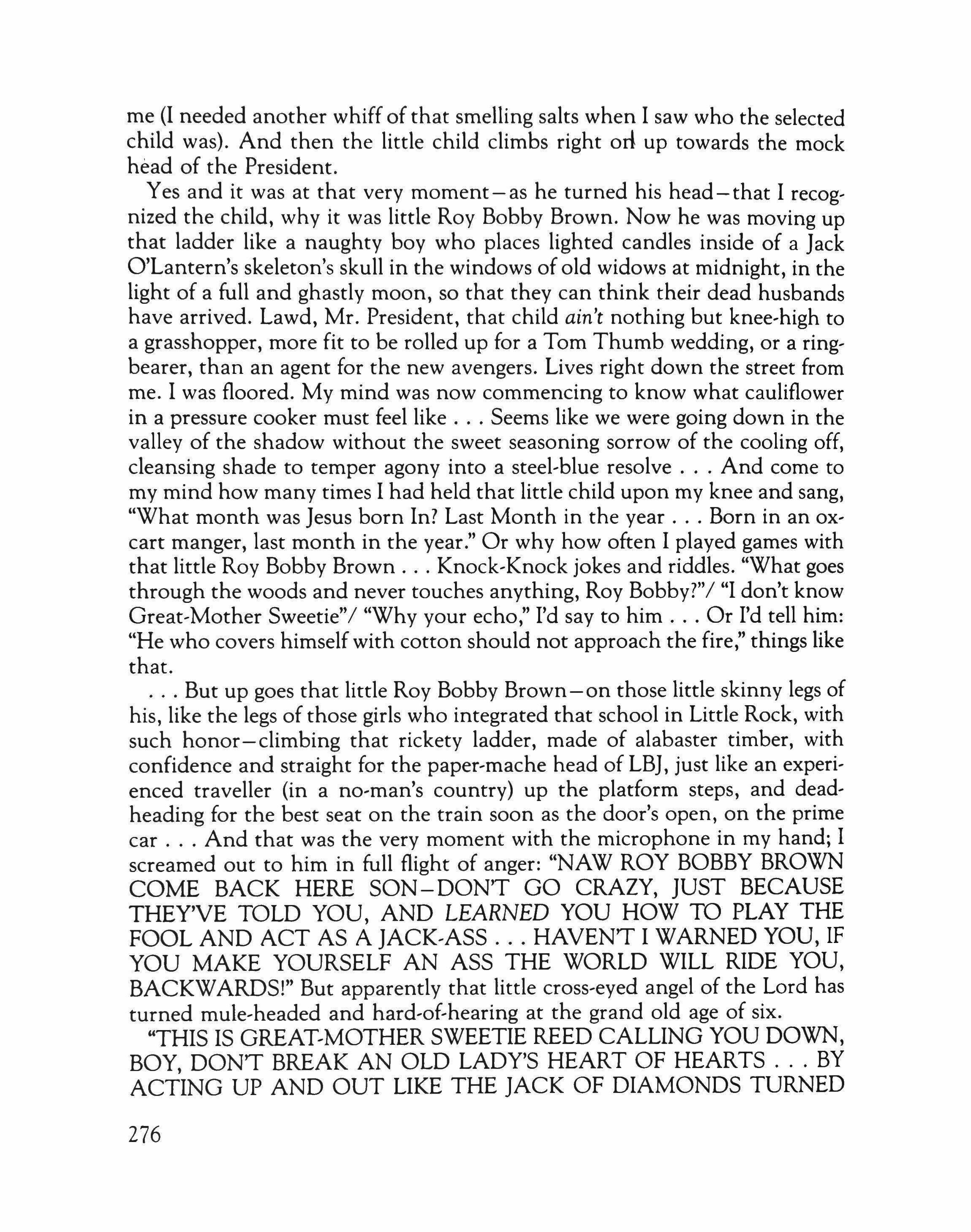
me (I needed another whiff of that smelling salts when I saw who the selected child was). And then the little child climbs right orl up towards the mock head of the President.
Yes and it was at that very moment - as he turned his head - that I recognized the child, why it was little Roy Bobby Brown. Now he was moving up that ladder like a naughty boy who places lighted candles inside of a Jack O'Lantern's skeleton's skull in the windows of old widows at midnight, in the light of a full and ghastly moon, so that they can think their dead husbands have arrived. Lawd, Mr. President, that child ain't nothing but knee-high to a grasshopper, more fit to be rolled up for a Tom Thumb wedding, or a ringbearer, than an agent for the new avengers. Lives right down the street from me. I was floored. My mind was now commencing to know what cauliflower in a pressure cooker must feel like Seems like we were going down in the valley of the shadow without the sweet seasoning sorrow of the cooling off, cleansing shade to temper agony into a steel-blue resolve And come to my mind how many times I had held that little child upon my knee and sang, "What month was Jesus born In? Last Month in the year Born in an oxcart manger, last month in the year." Or why how often I played games with that little Roy Bobby Brown Knock-Knock jokes and riddles. "What goes through the woods and never touches anything, Roy Bobby?"/ "I don't know Great-Mother Sweetie"/ "Why your echo," I'd say to him Or I'd tell him: "He who covers himselfwith cotton should not approach the fire," things like that
But up goes that little Roy Bobby Brown-on those little skinny legs of his, like the legs of those girls who integrated that school in Little Rock, with such honor-climbing that rickety ladder, made of alabaster timber, with confidence and straight for the paper-rnache head of LBJ, just like an experienced traveller (in a no-man's country) up the platform steps, and deadheading for the best seat on the train soon as the door's open, on the prime car And that was the very moment with the microphone in my hand; I screamed out to him in full flight of anger: "NAW ROY BOBBY BROWN COME BACK HERE SON-DON'T GO CRAZY, JUST BECAUSE THEY'VE TOLD YOU, AND LEARNED YOU HOW TO PLAY THE FOOL AND ACT AS A JACK-ASS HAVEN'T I WARNED YOU, IF YOU MAKE YOURSELF AN ASS THE WORLD WILL RIDE YOU, BACKWARDS!" But apparently that little cross-eyed angel of the Lord has turned mule-headed and hard-of-hearing at the grand old age of six.
"THIS IS GREAT-MOTHER SWEETIE REED CALLING YOU DOWN, BOY, DON'T BREAK AN OLD LADY'S HEART OF HEARTS BY ACTING UP AND OUT LIKE THE JACK OF DIAMONDS TURNED
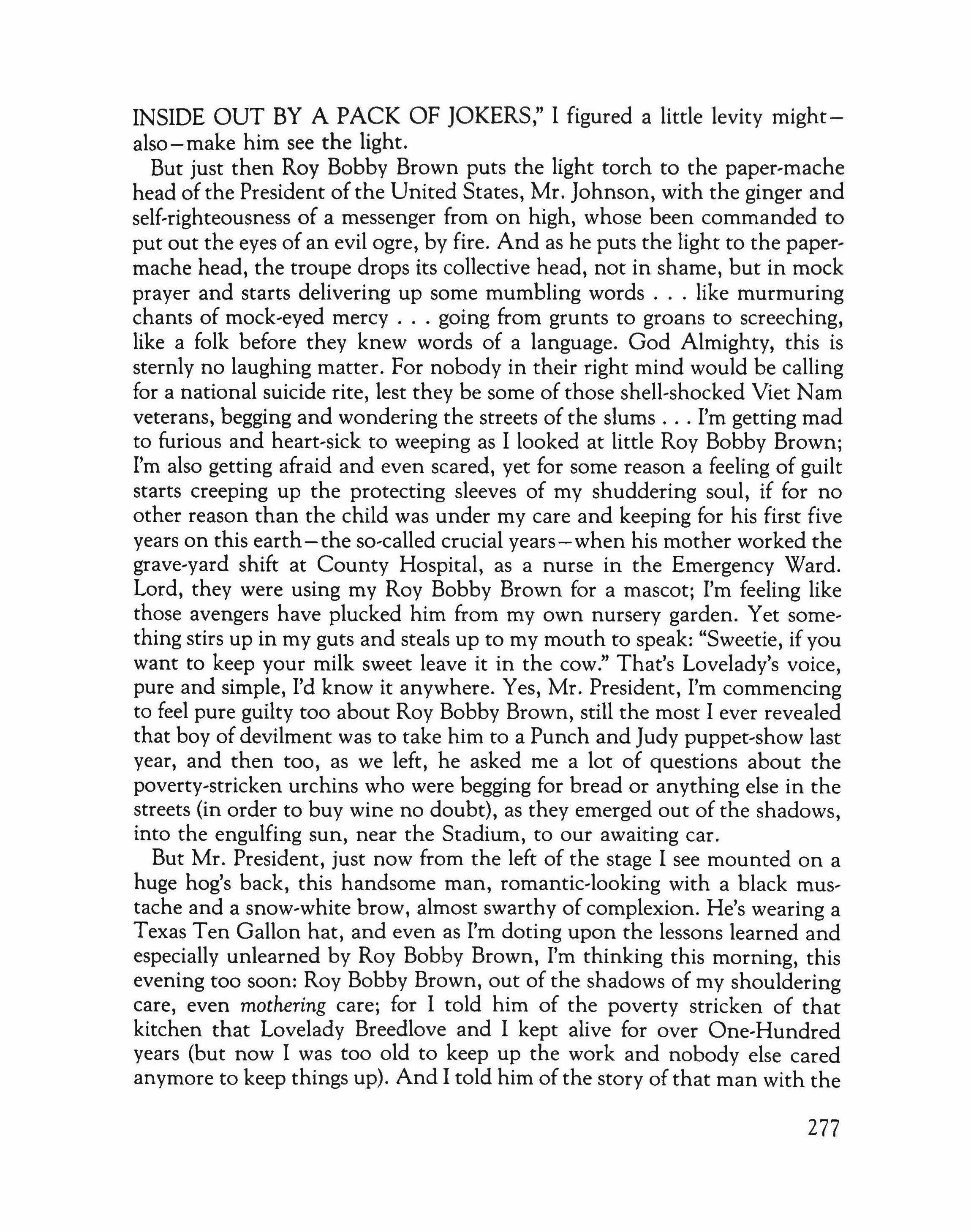
INSIDE OUT BY A PACK OF JOKERS," I figured a little levity mightalso - make him see the light.
But just then Roy Bobby Brown puts the light torch to the paper-mache head of the President of the United States, Mr. Johnson, with the ginger and self-righteousness of a messenger from on high, whose been commanded to put out the eyes of an evil ogre, by fire. And as he puts the light to the paper' mache head, the troupe drops its collective head, not in shame, but in mock prayer and starts delivering up some mumbling words like murmuring chants of mock-eyed mercy going from grunts to groans to screeching, like a folk before they knew words of a language. God Almighty, this is sternly no laughing matter. For nobody in their right mind would be calling for a national suicide rite, lest they be some of those shell-shocked Viet Nam veterans, begging and wondering the streets of the slums I'm getting mad to furious and heart-sick to weeping as I looked at little Roy Bobby Brown; I'm also getting afraid and even scared, yet for some reason a feeling of guilt starts creeping up the protecting sleeves of my shuddering soul, if for no other reason than the child was under my care and keeping for his first five years on this earth-the so-called crucial years-when his mother worked the grave-yard shift at County Hospital, as a nurse in the Emergency Ward. Lord, they were using my Roy Bobby Brown for a mascot; I'm feeling like those avengers have plucked him from my own nursery garden. Yet some' thing stirs up in my guts and steals up to my mouth to speak: "Sweetie, if you want to keep your milk sweet leave it in the cow." That's Lovelady's voice, pure and simple, I'd know it anywhere. Yes, Mr. President, I'm commencing to feel pure guilty too about Roy Bobby Brown, still the most I ever revealed that boy of devilment was to take him to a Punch and Judy puppet-show last year, and then too, as we left, he asked me a lot of questions about the poverty-stricken urchins who were begging for bread or anything else in the streets (in order to buy wine no doubt), as they emerged out of the shadows, into the engulfing sun, near the Stadium, to our awaiting car.
But Mr. President, just now from the left of the stage I see mounted on a huge hog's back, this handsome man, romantic,looking with a black mustache and a snow-white brow, almost swarthy of complexion. He's wearing a Texas Ten Gallon hat, and even as I'm doting upon the lessons learned and especially unlearned by Roy Bobby Brown, I'm thinking this morning, this evening too soon: Roy Bobby Brown, out of the shadows of my shouldering care, even mothering care; for I told him of the poverty stricken of that kitchen that Lovelady Breedlove and I kept alive for over One-Hundred years (but now I was too old to keep up the work and nobody else cared anymore to keep things up). And I told him of the story of that man with the
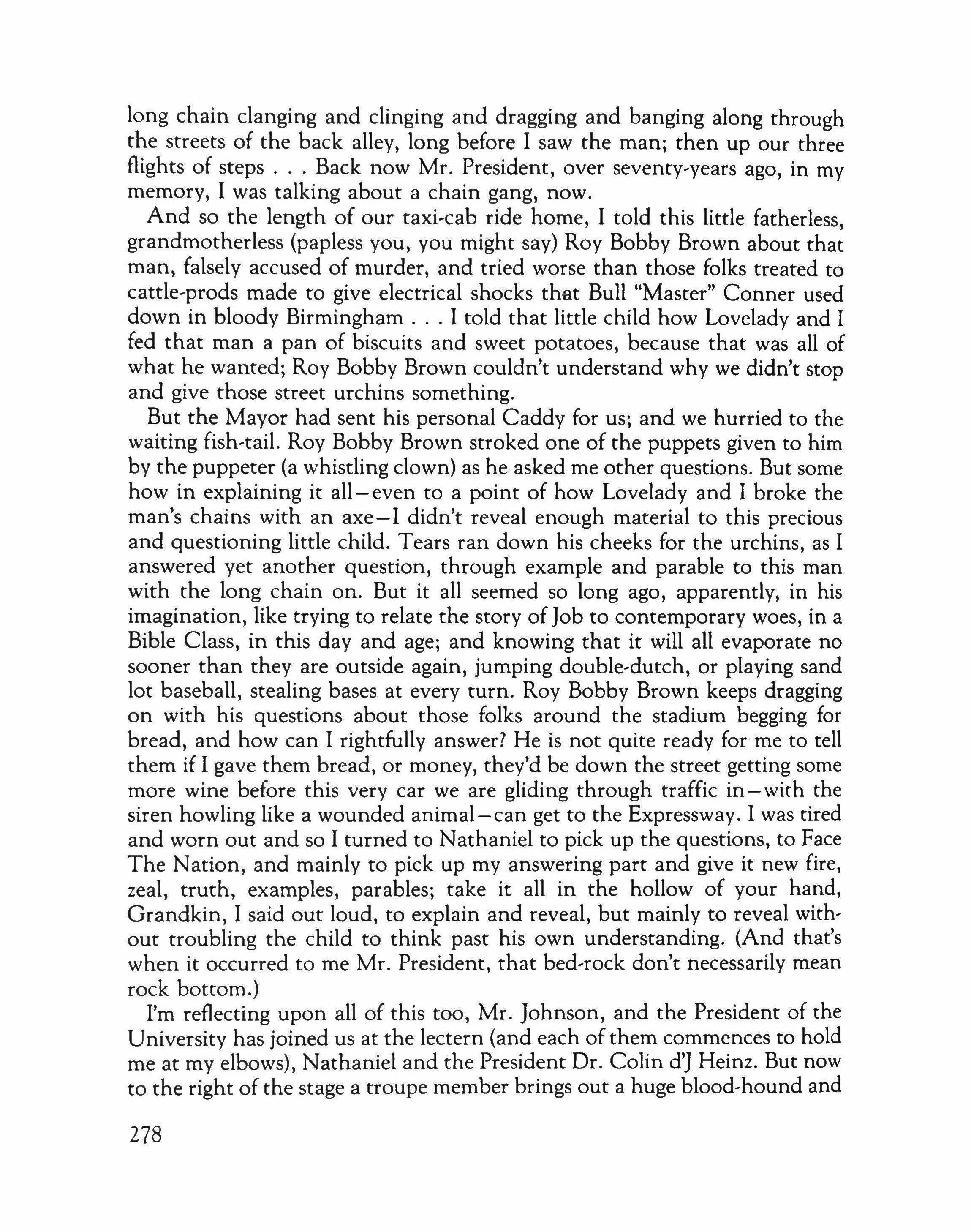
long chain clanging and clinging and dragging and banging along through the streets of the back alley, long before I saw the man; then up our three flights of steps Back now Mr. President, over seventv-vears ago, in my memory, I was talking about a chain gang, now.
And so the length of our taxi-cab ride home, I told this little fatherless, grandmotherless (papless you, you might say) Roy Bobby Brown about that man, falsely accused of murder, and tried worse than those folks treated to cattle-prods made to give electrical shocks that Bull "Master" Conner used down in bloody Birmingham I told that little child how Lovelady and I fed that man a pan of biscuits and sweet potatoes, because that was all of what he wanted; Roy Bobby Brown couldn't understand why we didn't stop and give those street urchins something.
But the Mayor had sent his personal Caddy for us; and we hurried to the waiting fish-tail. Roy Bobby Brown stroked one of the puppets given to him by the puppeter (a whistling clown) as he asked me other questions. But some how in explaining it all-even to a point of how Lovelady and I broke the man's chains with an axe-I didn't reveal enough material to this precious and questioning little child. Tears ran down his cheeks for the urchins, as I answered yet another question, through example and parable to this man with the long chain on. But it all seemed so long ago, apparently, in his imagination, like trying to relate the story ofJob to contemporary woes, in a Bible Class, in this day and age; and knowing that it will all evaporate no sooner than they are outside again, jumping double-dutch, or playing sand lot baseball, stealing bases at every turn. Roy Bobby Brown keeps dragging on with his questions about those folks around the stadium begging for bread, and how can I rightfully answer? He is not quite ready for me to tell them if I gave them bread, or money, they'd be down the street getting some more wine before this very car we are gliding through traffic in - with the siren howling like a wounded animal- can get to the Expressway. I was tired and worn out and so I turned to Nathaniel to pick up the questions, to Face The Nation, and mainly to pick up my answering part and give it new fire, zeal, truth, examples, parables; take it all in the hollow of your hand, Grandkin, I said out loud, to explain and reveal, but mainly to reveal with, out troubling the child to think past his own understanding. (And that's when it occurred to me Mr. President, that bed-rock don't necessarily mean rock bottom.)
I'm reflecting upon all of this too, Mr. Johnson, and the President of the University has joined us at the lectern (and each of them commences to hold me at my elbows), Nathaniel and the President Dr. Colin d'J Heinz. But now to the right ofthe stage a troupe member brings out a huge blood,hound and

a stuffed scarecrow with a bunting swept across its body reading: "LBJ, The Rebel." And then right there, for all to see, this bloodhound, on a short'lease of a chain held by a muscular midget, starts devouring the effigy, that the troupe shaped out of potted-meat, spam, chicken hearts, and liver, and horse'meat (stolen no doubt from some slum grocery meat-mart).
I swooned back into Nathaniel's arms, as I watched the bloodhound tear away at the flesh of these different meats, and at this moment all of the troupe on stage starts pointing with glee to this side-show event. Nathaniel swept the smelling salts back and forth beneath my nose. I was holding on for dear life. I wanted to flag them all down with my white handerchief-but I thought, well they would misread this too, misunderstand it, anyhow. Mean, time, the President of the University has broken away from Nathaniel and I; he was rushing toward the general mayhem on stage, his arms waving frantically for all to cease; he was howling in confusion and outrage, trying to drive all of the troupe off-stage The audience was in an up-roar, they were throwing tomatoes and junk onto the stage; Nathaniel put his arms about my shoulders for protection's sake
I'm telling you Mr. President, why dots and dashes splashed before mine eyes and I wanted to/started to send you a telegram, via Nathaniel: "What hath God wrought?" But I didn't have the power to pick up the separate pieces of my imagination, let alone my will (with Nathaniel's aid) to walk away, and yet a part of me said, no I shall not be driven out, I shall not be moved! Talk about folks acting as if they had an important rider to mount upon a sluggish, vulgar steed; now I wandered about the stage freeing my arm from Nathaniel's, let an old lady see what she could do If they wouldn't listen to the President, then perhaps they'd respect a One-Hundred year old woman, if they had to face her face to face. But I'm forced to back off soon enough, because these troupe members have sown seeds of contentions amongst their own numbers and now they are fighting with each other. (I heard a fire alarm go off, and I spotted members of the audience racing off in all directions.) Nathaniel's thrown his body in front of my own for protection. Meantime the mock head of LBJ is slowly burning, like a slab of bacon under a slow burner
And I'm now thinking perhaps these new avengers to the constitution were no more confused than Mr. Jefferson writing out that it was self-evident that all men were created equal (as long as he didn't have to deal with the colored ones, he didn't write that in those sacred papers, but he sure wrote it elsewhere in the dark) even as he slept with a slave lady, and jamming her people as well as those he created out the crack of his own loins, as he declared his independence of their solid flesh, and his lily-white ancestors
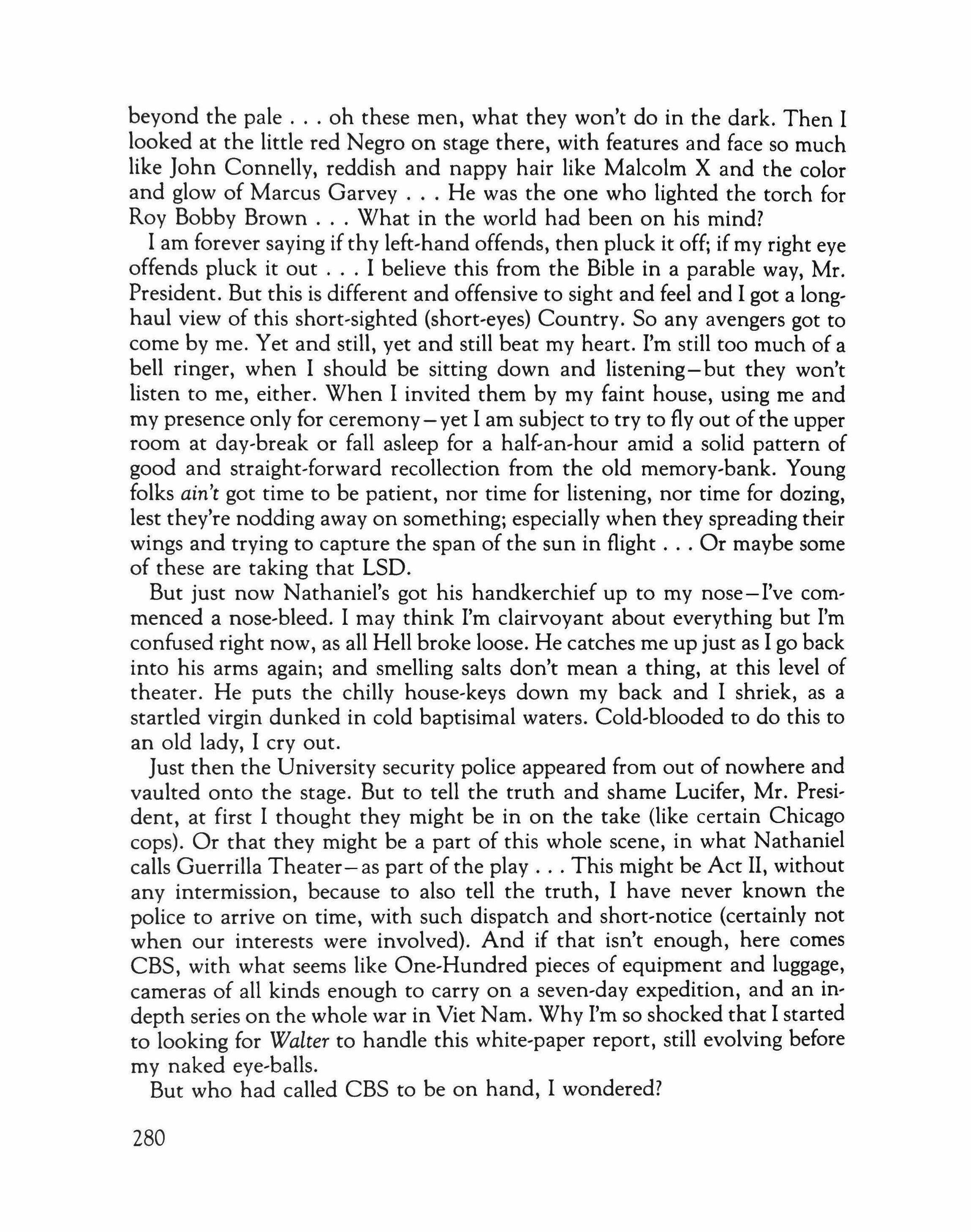
beyond the pale oh these men, what they won't do in the dark. Then I looked at the little red Negro on stage there, with features and face so much like John Connelly, reddish and nappy hair like Malcolm X and the color and glow of Marcus Garvey He was the one who lighted the torch for Roy Bobby Brown What in the world had been on his mind?
I am forever saying if thy left,hand offends, then pluck it off; if my right eye offends pluck it out I believe this from the Bible in a parable way, Mr. President. But this is different and offensive to sight and feel and I got a long, haul view of this short-sighted (short-eyes) Country. So any avengers got to come by me. Yet and still, yet and still beat my heart. I'm still too much of a bell ringer, when I should be sitting down and listening-but they won't listen to me, either. When I invited them by my faint house, using me and my presence only for ceremony - yet I am subject to try to fly out ofthe upper room at day-break or fall asleep for a half-an-hour amid a solid pattern of good and straight-forward recollection from the old memory-bank. Young folks ain't got time to be patient, nor time for listening, nor time for dozing, lest they're nodding away on something; especially when they spreading their wings and trying to capture the span of the sun in flight Or maybe some of these are taking that LSD.
But just now Nathaniel's got his handkerchief up to my nose-I've com' meneed a nose-bleed. I may think I'm clairvoyant about everything but I'm confused right now, as all Hell broke loose. He catches me up just as I go back into his arms again; and smelling salts don't mean a thing, at this level of theater. He puts the chilly house-keys down my back and I shriek, as a startled virgin dunked in cold baptisimal waters. Cold-blooded to do this to an old lady, I cry out.
Just then the University security police appeared from out of nowhere and vaulted onto the stage. But to tell the truth and shame Lucifer, Mr. President, at first I thought they might be in on the take (like certain Chicago cops). Or that they might be a part of this whole scene, in what Nathaniel calls Guerrilla Theater- as part of the play This might be Act II, without any intermission, because to also tell the truth, I have never known the police to arrive on time, with such dispatch and short'notice (certainly not when our interests were involved). And if that isn't enough, here comes CBS, with what seems like One-Hundred pieces of equipment and luggage, cameras of all kinds enough to carryon a seven-day expedition, and an in' depth series on the whole war in Viet Nam. Why I'm so shocked that I started to looking for Walter to handle this white-paper report, still evolving before my naked eve-balls.
But who had called CBS to be on hand, I wondered?
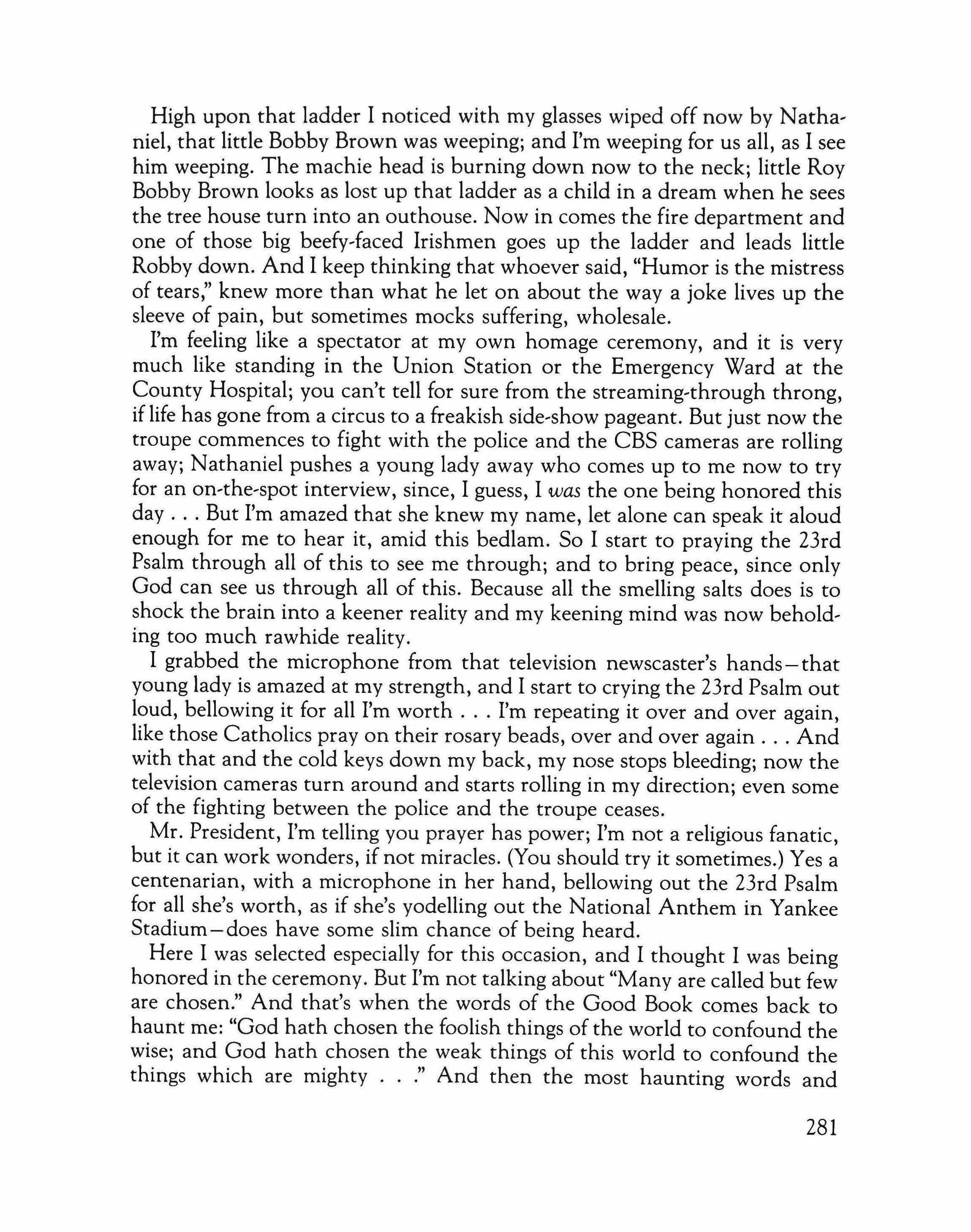
High upon that ladder I noticed with my glasses wiped off now by Nathaniel, that little Bobby Brown was weeping; and I'm weeping for us all, as I see him weeping. The machie head is burning down now to the neck; little Roy Bobby Brown looks as lost up that ladder as a child in a dream when he sees the tree house turn into an outhouse. Now in comes the fire department and one of those big beefy-faced Irishmen goes up the ladder and leads little Robby down. And I keep thinking that whoever said, "Humor is the mistress of tears:' knew more than what he let on about the way a joke lives up the sleeve of pain, but sometimes mocks suffering, wholesale.
I'm feeling like a spectator at my own homage ceremony, and it is very much like standing in the Union Station or the Emergency Ward at the County Hospital; you can't tell for sure from the streaming-through throng, if life has gone from a circus to a freakish side-show pageant. But just now the troupe commences to fight with the police and the CBS cameras are rolling away; Nathaniel pushes a young lady away who comes up to me now to try for an on-the-spot interview, since, I guess, I was the one being honored this day But I'm amazed that she knew my name, let alone can speak it aloud enough for me to hear it, amid this bedlam. So I start to praying the 23rd Psalm through all of this to see me through; and to bring peace, since only God can see us through all of this. Because all the smelling salts does is to shock the brain into a keener reality and my keening mind was now behold, ing too much rawhide reality.
I grabbed the microphone from that television newscaster's hands-that young lady is amazed at my strength, and I start to crying the 23rd Psalm out loud, bellowing it for all I'm worth I'm repeating it over and over again, like those Catholics pray on their rosary beads, over and over again And with that and the cold keys down my back, my nose stops bleeding; now the television cameras turn around and starts rolling in my direction; even some of the fighting between the police and the troupe ceases.
Mr. President, I'm telling you prayer has power; I'm not a religious fanatic, but it can work wonders, if not miracles. (You should try it sometimes.) Yes a centenarian, with a microphone in her hand, bellowing out the 23rd Psalm for all she's worth, as if she's yodelling out the National Anthem in Yankee Stadium-does have some slim chance of being heard.
Here I was selected especially for this occasion, and I thought I was being honored in the ceremony. But I'm not talking about "Many are called but few are chosen." And that's when the words of the Good Book comes back to haunt me: "God hath chosen the foolish things of the world to confound the wise; and God hath chosen the weak things of this world to confound the things which are mighty ." And then the most haunting words and
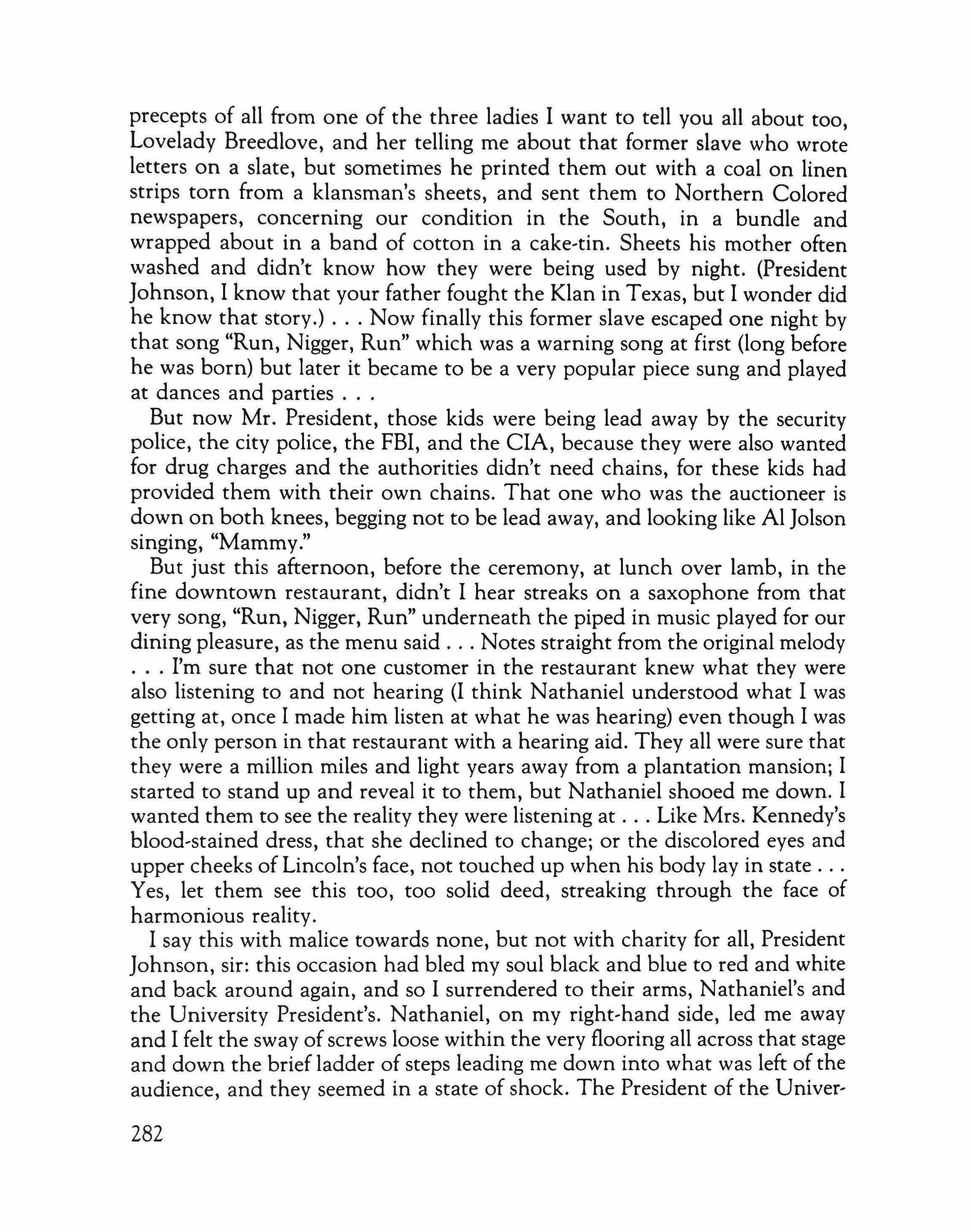
precepts of all from one of the three ladies I want to tell you all about too, Lovelady Breedlove, and her telling me about that former slave who wrote letters on a slate, but sometimes he printed them out with a coal on linen strips torn from a klansman's sheets, and sent them to Northern Colored newspapers, concerning our condition in the South, in a bundle and wrapped about in a band of cotton in a cake-tin. Sheets his mother often washed and didn't know how they were being used by night. (President Johnson, I know that your father fought the Klan in Texas, but I wonder did he know that story.) Now finally this former slave escaped one night by that song "Run, Nigger, Run" which was a warning song at first (long before he was born) but later it became to be a very popular piece sung and played at dances and parties
But now Mr. President, those kids were being lead away by the security police, the city police, the FBI, and the CIA, because they were also wanted for drug charges and the authorities didn't need chains, for these kids had provided them with their own chains. That one who was the auctioneer is down on both knees, begging not to be lead away, and looking like Al [olson singing, "Mammy."
But just this afternoon, before the ceremony, at lunch over lamb, in the fine downtown restaurant, didn't I hear streaks on a saxophone from that very song, "Run, Nigger, Run" underneath the piped in music played for our dining pleasure, as the menu said Notes straight from the original melody I'm sure that not one customer in the restaurant knew what they were also listening to and not hearing (I think Nathaniel understood what I was getting at, once I made him listen at what he was hearing) even though I was the only person in that restaurant with a hearing aid. They all were sure that they were a million miles and light years away from a plantation mansion; I started to stand up and reveal it to them, but Nathaniel shooed me down. I wanted them to see the reality they were listening at Like Mrs. Kennedy's blood-stained dress, that she declined to change; or the discolored eyes and upper cheeks of Lincoln's face, not touched up when his body lay in state Yes, let them see this too, too solid deed, streaking through the face of harmonious reality.
I say this with malice towards none, but not with charity for all, President Johnson, sir: this occasion had bled my soul black and blue to red and white and back around again, and so I surrendered to their arms, Nathaniel's and the University President's. Nathaniel, on my right,hand side, led me away and I felt the sway of screws loose within the very flooring all across that stage and down the brief ladder of steps leading me down into what was left of the audience, and they seemed in a state of shock. The President of the Univer-
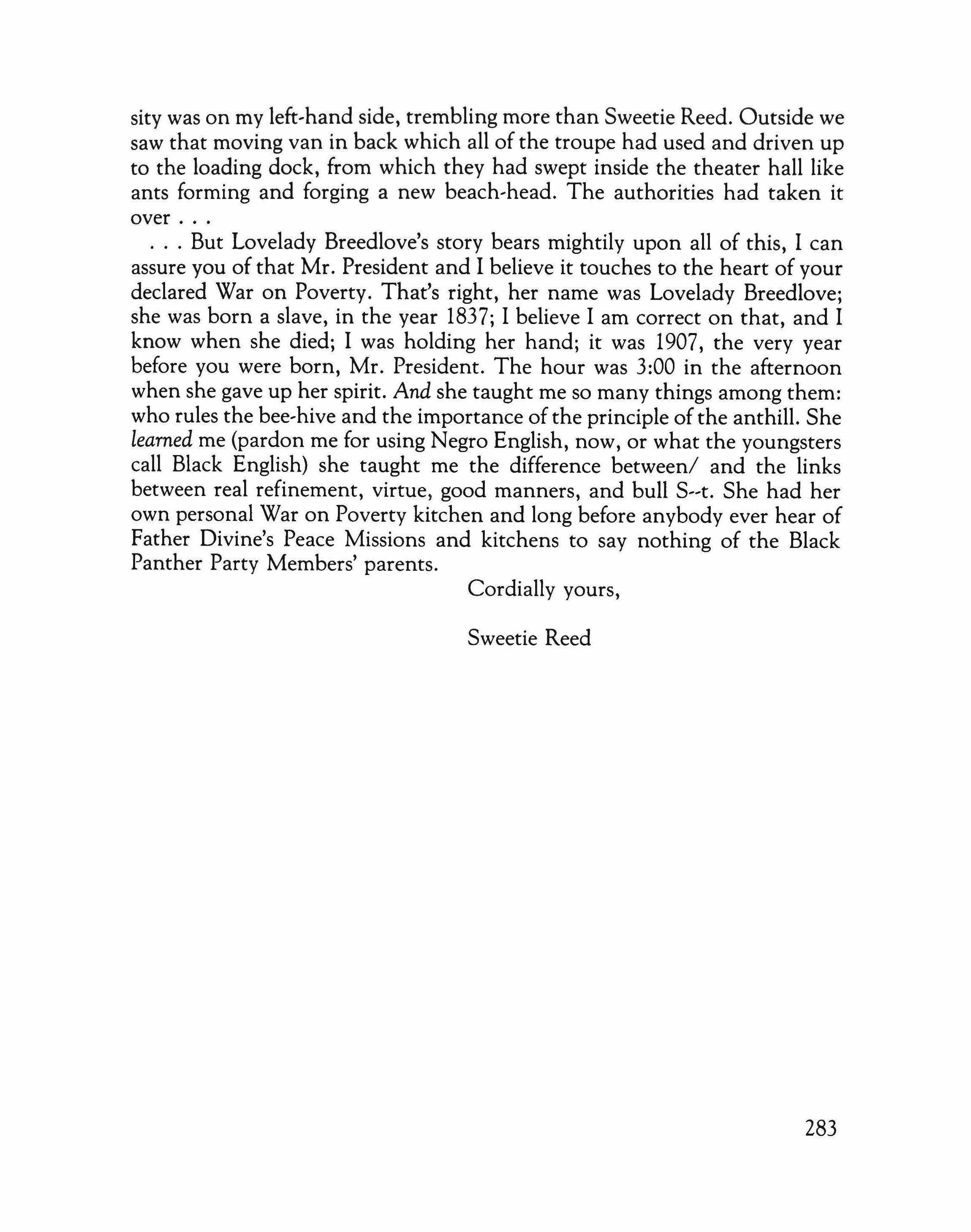
sity was on my left-hand side, trembling more than Sweetie Reed. Outside we saw that moving van in back which all of the troupe had used and driven up to the loading dock, from which they had swept inside the theater hall like ants forming and forging a new beach-head. The authorities had taken it over
But Lovelady Breedlove's story bears mightily upon all of this, I can assure you of that Mr. President and I believe it touches to the heart of your declared War on Poverty. That's right, her name was Lovelady Breedlove; she was born a slave, in the year 1837; I believe I am correct on that, and I know when she died; I was holding her hand; it was 1907, the very year before you were born, Mr. President. The hour was 3:00 in the afternoon when she gave up her spirit. And she taught me so many things among them: who rules the bee,hive and the importance of the principle ofthe anthill. She learned me (pardon me for using Negro English, now, or what the youngsters call Black English) she taught me the difference between/ and the links between real refinement, virtue, good manners, and bull S"t. She had her own personal War on Poverty kitchen and long before anybody ever hear of Father Divine's Peace Missions and kitchens to say nothing of the Black Panther Party Members' parents.
Cordially
yours, Sweetie Reed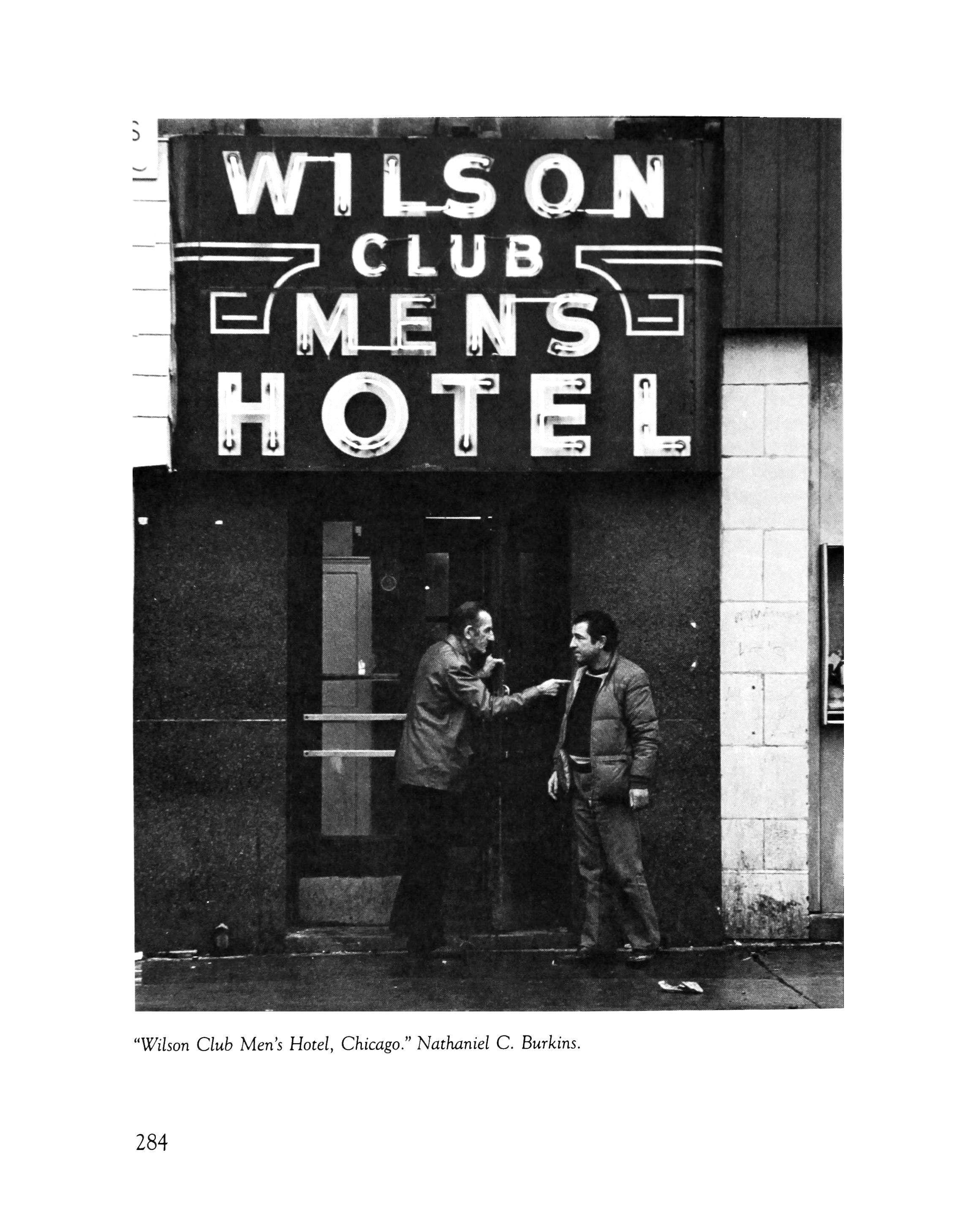

It is September and I am fighting the heat. Everyone I talk to mentions the beautiful weather we're having.
Every night I sweat and sweat. I sit on my back, propped up on the mattress on the floor, legs out of the covers. Later it gets cool. In the morning I am hot again.
I decide that I am sick again. I get up late one night, past midnight, dripping sweat, and walk to the bathroom. The wind rustles the curtains. Moonlight shines onto my rocking chair against the wall.
The urine is cloudy again. I take two Flagyl to kill the bacteria, two Meclizine for the nausea caused by the Flagyl. I can feel the bacteria racing through my intestines.
It was September and hot. The rains were over for the week, but we were mired in mud all night. Leeches crawled over the tops of our boots and up the insides of our fatigues, stopping at the fat part of the thigh. All we could do was squash them and feel the blood and pus leak slowly down our legs.
It was hot and we couldn't sleep. Once a red flare lit up our perimeter from our side. The lieutenant got on the radio and someone killed the flare. We smelled it the rest of the night.
Whenever I am in a hospital I am awake when the nurses change shifts. I see them walk quietly past the darkened rooms, usually discussing food. Each time I learn who my ward or floor nurses are. The new ones offer backrubs. The older ones know not to walk into the center of the room - they stand near the rails of the beds with their watches and thermometers, their IV bags.
I had better IV technicians in the jungle.
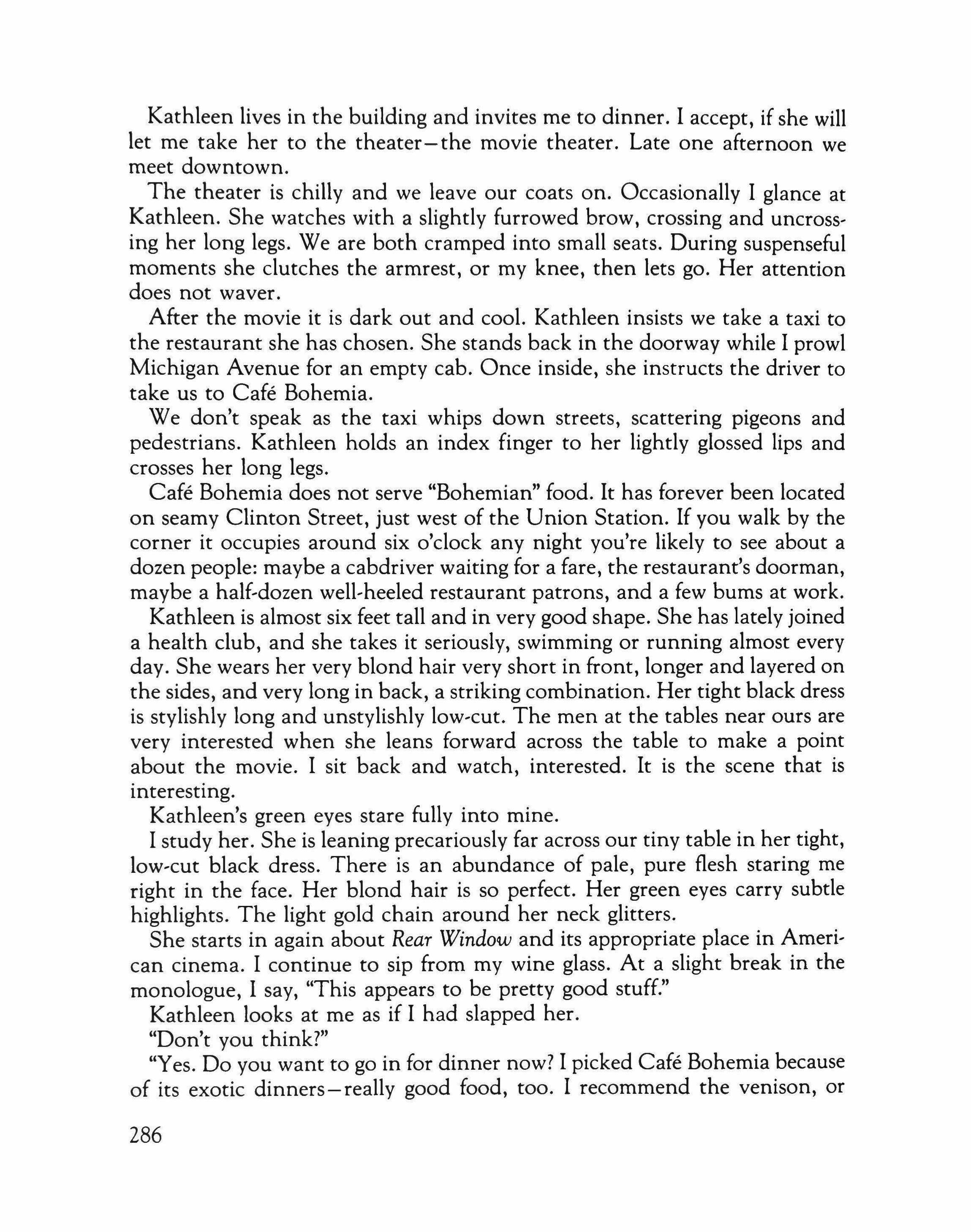
Kathleen lives in the building and invites me to dinner. I accept, if she will let me take her to the theater-the movie theater. Late one afternoon we meet downtown.
The theater is chilly and we leave our coats on. Occasionally I glance at Kathleen. She watches with a slightly furrowed brow, crossing and uncrossing her long legs. We are both cramped into small seats. During suspenseful moments she clutches the armrest, or my knee, then lets go. Her attention does not waver.
After the movie it is dark out and cool. Kathleen insists we take a taxi to the restaurant she has chosen. She stands back in the doorway while I prowl Michigan Avenue for an empty cab. Once inside, she instructs the driver to take us to Cafe Bohemia.
We don't speak as the taxi whips down streets, scattering pigeons and pedestrians. Kathleen holds an index finger to her lightly glossed lips and crosses her long legs.
Cafe Bohemia does not serve "Bohemian" food. It has forever been located on seamy Clinton Street, just west of the Union Station. If you walk by the corner it occupies around six o'clock any night you're likely to see about a dozen people: maybe a cabdriver waiting for a fare, the restaurant's doorman, maybe a half-dozen well-heeled restaurant patrons, and a few bums at work.
Kathleen is almost six feet tall and in very good shape. She has lately joined a health club, and she takes it seriously, swimming or running almost every day. She wears her very blond hair very short in front, longer and layered on the sides, and very long in back, a striking combination. Her tight black dress is stylishly long and unstylishly low-cut. The men at the tables near ours are very interested when she leans forward across the table to make a point about the movie. I sit back and watch, interested. It is the scene that is interesting.
Kathleen's green eyes stare fully into mine.
I study her. She is leaning precariously far across our tiny table in her tight, low-cut black dress. There is an abundance of pale, pure flesh staring me right in the face. Her blond hair is so perfect. Her green eyes carry subtle highlights. The light gold chain around her neck glitters.
She starts in again about Rear Window and its appropriate place in American cinema. I continue to sip from my wine glass. At a slight break in the monologue, I say, "This appears to be pretty good stuff."
Kathleen looks at me as if I had slapped her.
"Don't you think?"
"Yes. Do you want to go in for dinner now? I picked Cafe Bohemia because of its exotic dinners-really good food, too. I recommend the venison, or

buffalo steak. Venison is in season. They also offer a fine pheasant dish, and other fowl. Sometimes they have very rare items, such as antelope."
She is very earnest. The hurt look has been replaced by this new need to examine the menu, to see how exotic her dinner is to be, to join the elegance in the dining room.
I think maybe she's having a seriously earnest problem keeping all of her bodily parts within her dress, or so it appears, and maybe she needs to stand up to adjust herself.
As she rises, she smoothes her dress and remarks, "Maybe they have some 'big cat' steaks in this week."
I am rising and continue to rise, to stand up straight, and when I am standing apart from the table and the people around me, I am back in the jungle, standing in the shade of a tree, hurriedly dipping a piece of fatigue cloth into a pot of lukewarm water and fastening it, dripping, around my head, tying it in back, like a pirate in a movie, getting the helmet back on over it as fast as I can, listening for the incoming, watching Pfc. Ray Sharp standing in the sunlight with a long knife that is his nickname, with his helmet on the ground, with the knife in one hand and a scratching, clawing, scrawny village cat in the other. The sun is in his eyes and he is talking to himself.
Kathleen is waiting patiently. I am standing still next to our table. Her skin is so pale, so white. The chain glitters around her neck. I know her green eyes are on me but I can't meet them.
The sun is unbearable, the heat, the humidity, the days and days of"paddy patrol," the weight of the packs, the AR�15's, the salt tablets driving us to filthy water holes, forgetting helmets, weapons, caution, the second lieuten, ant losing a leg at the second waterhole two days ago from the punji stick, though the chopper took him out whole, his weak grin flashing in the deadly heat and sunlight, but we knew. We knew about the leg. We knew he wouldn't be coming back.
Kathleen is starting to look concerned, starting to edge her long body over around the table, the pale skin ablaze under the subdued light, the chain glinting, over toward me, inching, edging closer, watching me. Those green eyes. That pale, so pale, skin.
So hot that day. Sharp, muttering to himself. The village cat with the wild green eyes. Scratching Sharp's arm, the welts dripping single droplets of blood across his pale chest. Sharp stands there in the sunlight, his favorite knife in his hand.
Kathleen parts her lips to speak.
Sharp mutters loudly now and his hand comes down viciously in a fast
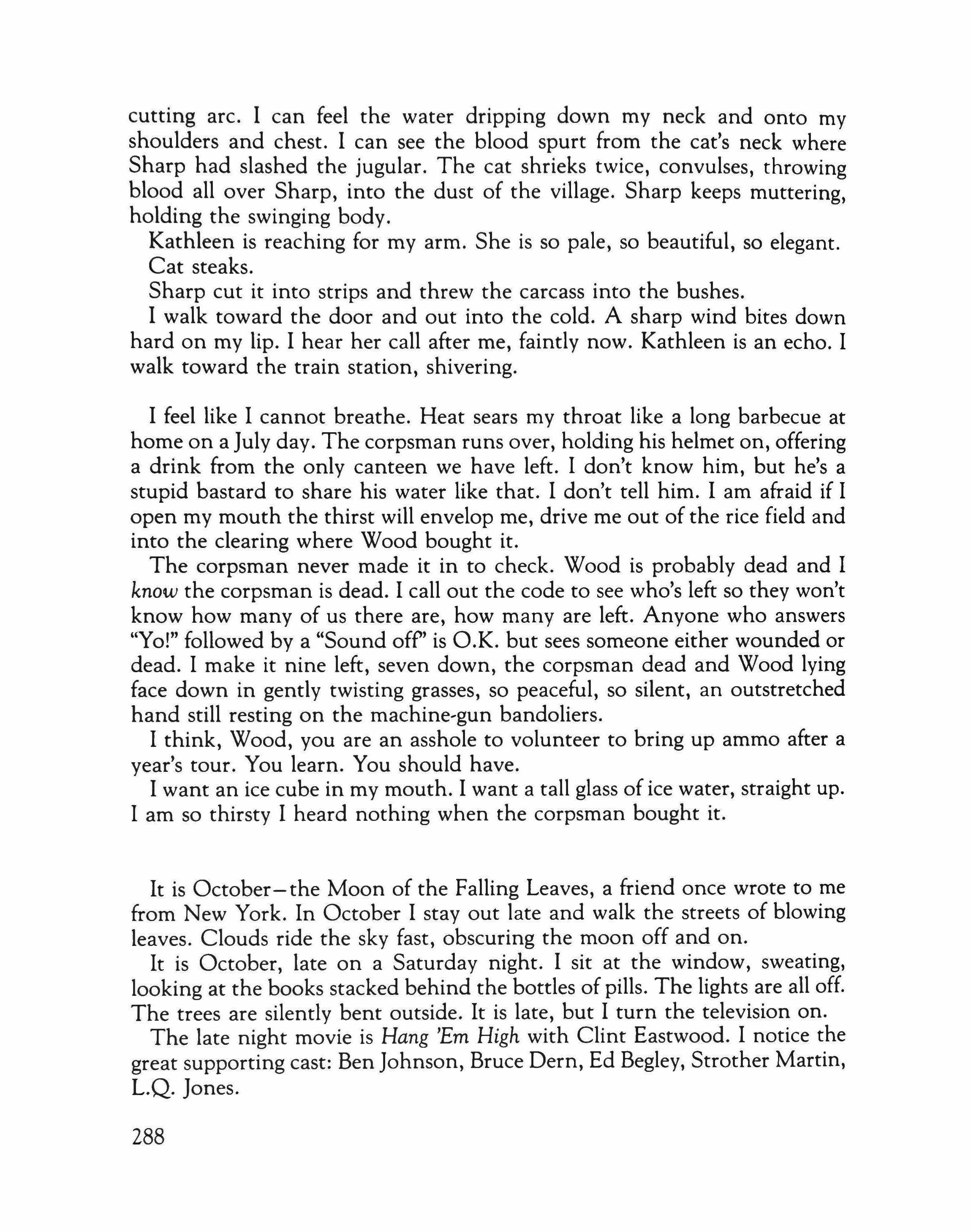
cutting arc. I can feel the water dripping down my neck and onto my shoulders and chest. I can see the blood spurt from the eat's neck where Sharp had slashed the jugular. The cat shrieks twice, convulses, throwing blood all over Sharp, into the dust of the village. Sharp keeps muttering, holding the swinging body.
Kathleen is reaching for my arm. She is so pale, so beautiful, so elegant. Cat steaks.
Sharp cut it into strips and threw the carcass into the bushes.
I walk toward the door and out into the cold. A sharp wind bites down hard on my lip. I hear her call after me, faintly now. Kathleen is an echo. I walk toward the train station, shivering.
I feel like I cannot breathe. Heat sears my throat like a long barbecue at home on a July day. The corpsman runs over, holding his helmet on, offering a drink from the only canteen we have left. I don't know him, but he's a stupid bastard to share his water like that. I don't tell him. I am afraid if I open my mouth the thirst will envelop me, drive me out of the rice field and into the clearing where Wood bought it.
The corpsman never made it in to check. Wood is probably dead and I know the corpsman is dead. I call out the code to see who's left so they won't know how many of us there are, how many are left. Anyone who answers "Yo!" followed by a "Sound off" is O.K. but sees someone either wounded or dead. I make it nine left, seven down, the corpsman dead and Wood lying face down in gently twisting grasses, so peaceful, so silent, an outstretched hand still resting on the machine-gun bandoliers.
I think, Wood, you are an asshole to volunteer to bring up ammo after a year's tour. You learn. You should have.
I want an ice cube in my mouth. I want a tall glass of ice water, straight up. I am so thirsty I heard nothing when the corpsman bought it.
It is October-the Moon of the Falling Leaves, a friend once wrote to me from New York. In October I stay out late and walk the streets of blowing leaves. Clouds ride the sky fast, obscuring the moon off and on.
It is October, late on a Saturday night. I sit at the window, sweating, looking at the books stacked behind the bottles of pills. The lights are all off. The trees are silently bent outside. It is late, but I turn the television on.
The late night movie is Hang 'Em High with Clint Eastwood. I notice the great supporting cast: Ben Johnson, Bruce Dern, Ed Begley, Strother Martin, L.Q. Jones.

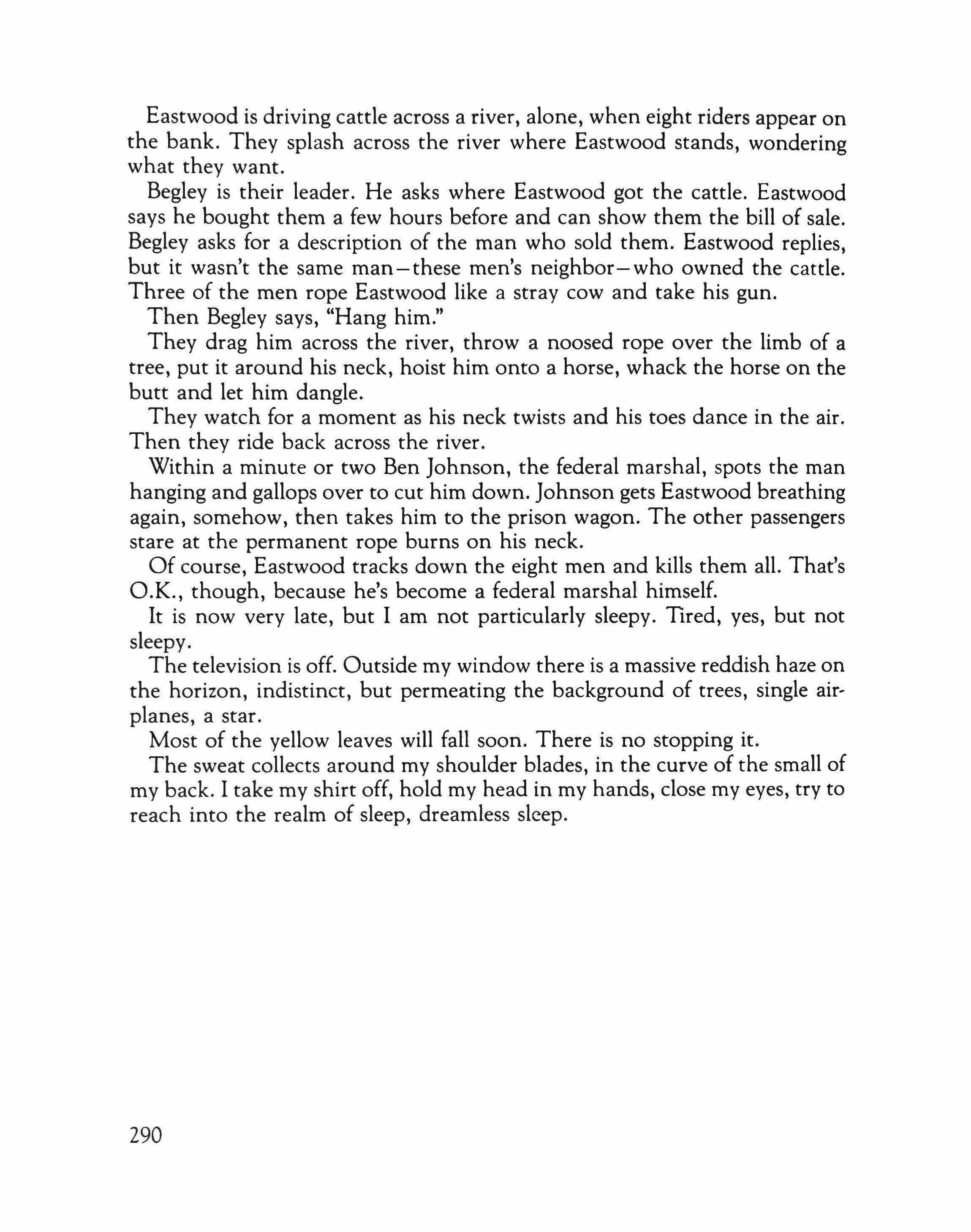
Eastwood is driving cattle across a river, alone, when eight riders appear on the bank. They splash across the river where Eastwood stands, wondering what they want.
Begley is their leader. He asks where Eastwood got the cattle. Eastwood says he bought them a few hours before and can show them the bill of sale. Begley asks for a description of the man who sold them. Eastwood replies, but it wasn't the same man-these men's neighbor-who owned the cattle. Three of the men rope Eastwood like a stray cow and take his gun.
Then Begley says, "Hang him."
They drag him across the river, throw a noosed rope over the limb of a tree, put it around his neck, hoist him onto a horse, whack the horse on the butt and let him dangle.
They watch for a moment as his neck twists and his toes dance in the air. Then they ride back across the river.
Within a minute or two Ben Johnson, the federal marshal, spots the man hanging and gallops over to cut him down. Johnson gets Eastwood breathing again, somehow, then takes him to the prison wagon. The other passengers stare at the permanent rope burns on his neck.
Of course, Eastwood tracks down the eight men and kills them all. That's O.K., though, because he's become a federal marshal himself.
It is now very late, but I am not particularly sleepy. Tired, yes, but not sleepy.
The television is off. Outside my window there is a massive reddish haze on the horizon, indistinct, but permeating the background of trees, single airplanes, a star.
Most of the yellow leaves will fall soon. There is no stopping it.
The sweat collects around my shoulder blades, in the curve of the small of my back. I take my shirt off, hold my head in my hands, close my eyes, try to reach into the realm of sleep, dreamless sleep.
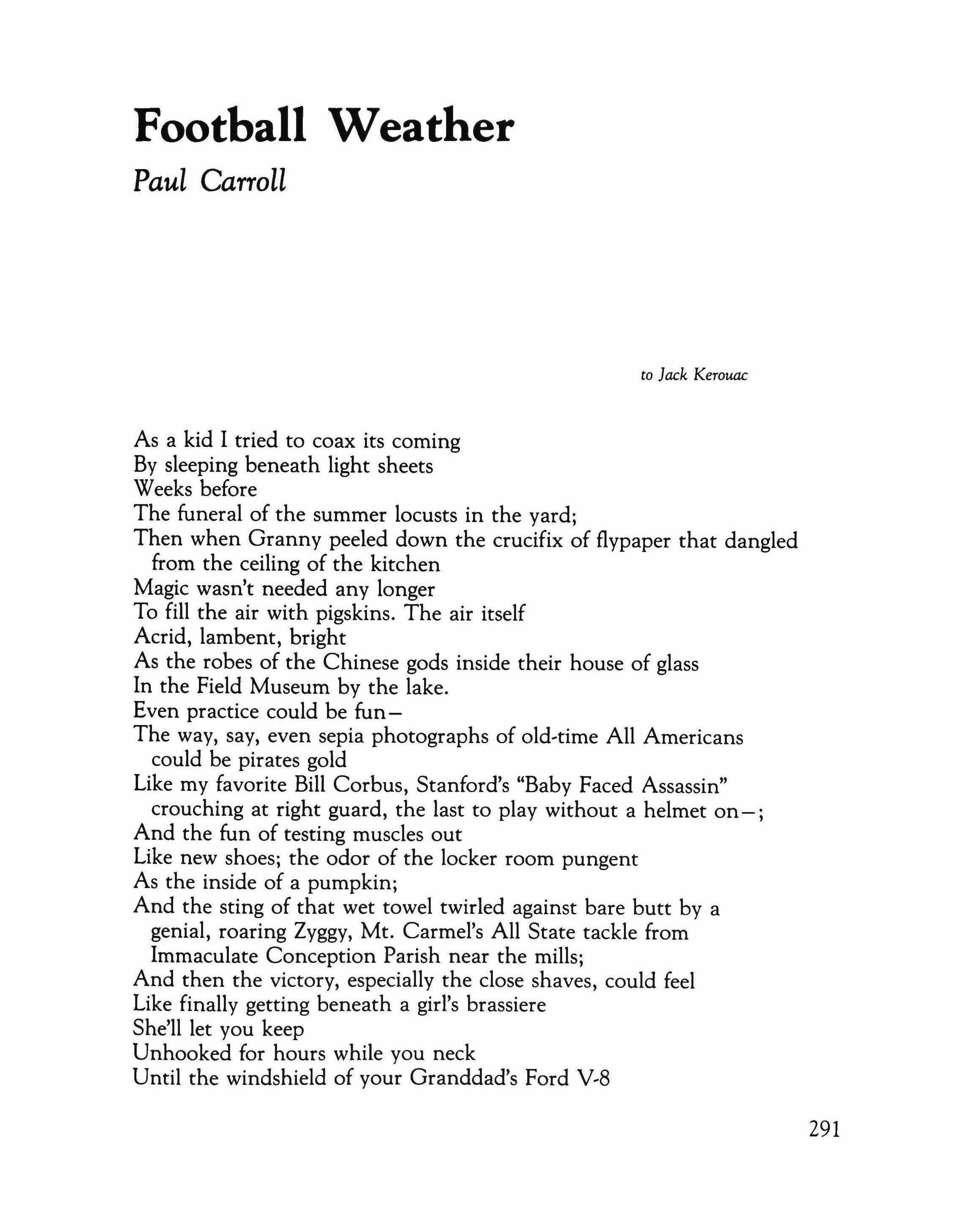
As a kid I tried to coax its coming
By sleeping beneath light sheets
Weeks before
The funeral of the summer locusts in the yard;
Then when Granny peeled down the crucifix of flypaper that dangled from the ceiling of the kitchen
Magic wasn't needed any longer
To fill the air with pigskins. The air itself
Acrid, lambent, bright
As the robes of the Chinese gods inside their house of glass
In the Field Museum by the lake.
Even practice could be fun-
The way, say, even sepia photographs of old-time All Americans could be pirates gold
Like my favorite Bill Corbus, Stanford's "Baby Faced Assassin" crouching at right guard, the last to play without a helmet on -;
And the fun of testing muscles out
Like new shoes; the odor of the locker room pungent
As the inside of a pumpkin;
And the sting of that wet towel twirled against bare butt by a genial, roaring Zyggy, Mt. Carmel's All State tackle from Immaculate Conception Parish near the mills;
And then the victory, especially the close shaves, could feel
Like finally getting beneath a girl's brassiere
She'll let you keep
Unhooked for hours while you neck
Until the windshield of your Granddad's Ford Y,8
to lack Kerouac
Becomes filled with a fog
Not even Fu Manchu could penetrate. Jack, Next football weather my son Luke will be in high school, Bigger than I was and well-coordinated=but
Couldn't care a plenary indulgence
If he ever lugs a pigskin down the turf
Or hits a long shot on the court. At times, I wish he would.
So he might taste the happiness you knew
Snagging Chris Zoukis' low pass to torpedo nine long yards to touchdown
And sink arch-rival Lawrence High
45 years ago come this Thanksgiving Day. Still, He has his own intensities
As wild as sports and writing were for us:
Luke's the seventh Rolling Stone.
And his electric guitar looks elegant and shiny black
As a quiet street at night
Glazed by rain and pumpkin frost.

Sometimes I forget the wheat in me just as I forget the lung swell or blood flow. But to feel the cool amber of it in the grain bin or the tempering tank or as it roars to the conveyor from the truck is enough to ripen the fields behind my eyes where horizons are the only limit.
There is sun there, and cloud shadow, heat and rain and wind whispering all the wheat names in my earsManitoba and Kubanka Red Durum and Dark Northern Spring Kharkov, Michikov, and Flintall in those fields that were prairie once, that were trees cleared and stumps burned or rocks pried from the earth and carried off.
And there are grain men there talking their price per bushel talking chinch bugs, rust and blight, always knowing the weather long before it comes. Now and then they drink together but each is lost in the future, lost in somewhere else, waiting.
And all the while, slowly slowly as green turns to yellow
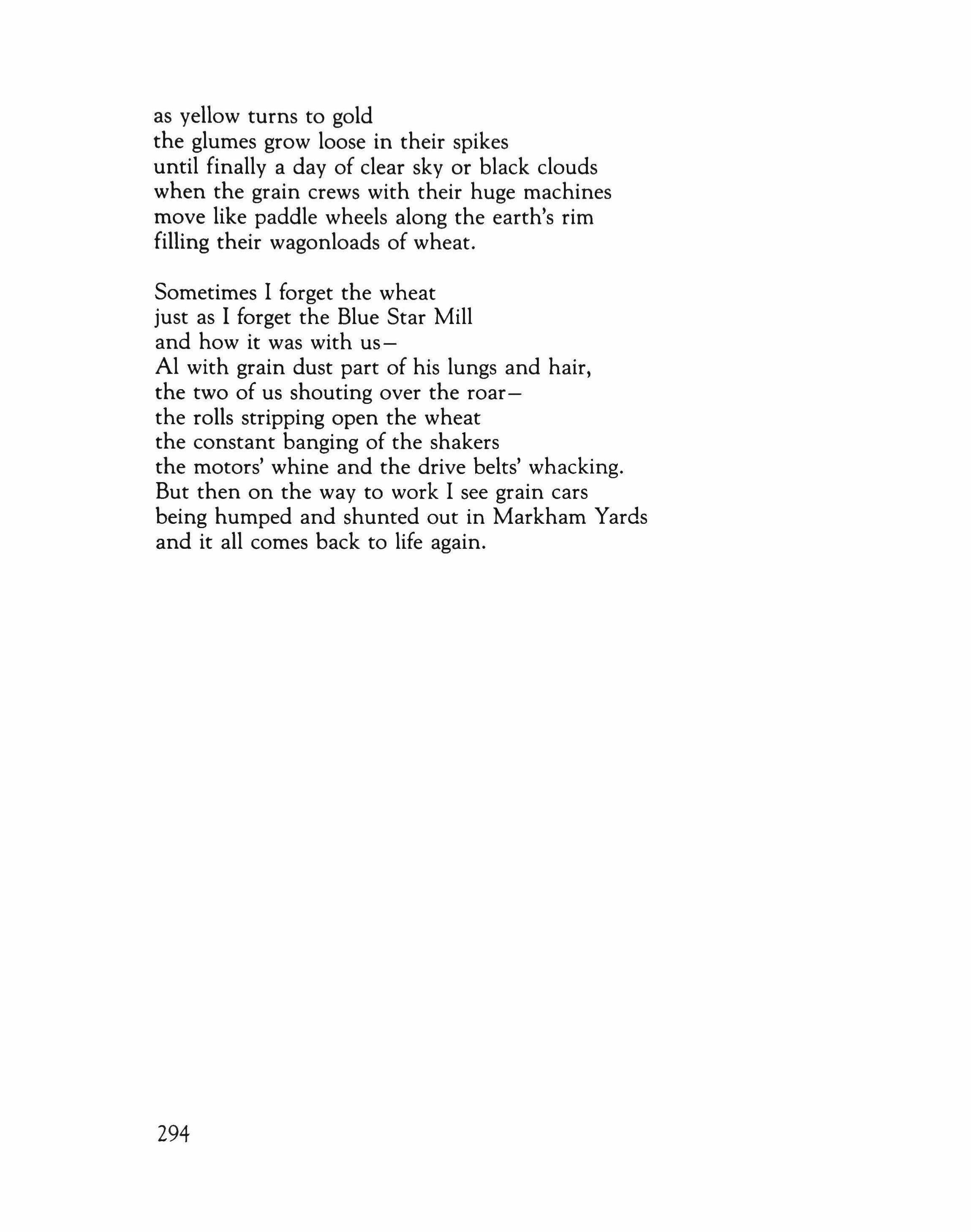
as yellow turns to gold the glumes grow loose in their spikes until finally a day of clear sky or black clouds when the grain crews with their huge machines move like paddle wheels along the earth's rim filling their wagonloads of wheat.
Sometimes I forget the wheat just as I forget the Blue Star Mill and how it was with usAl with grain dust part of his lungs and hair, the two of us shouting over the roarthe rolls stripping open the wheat the constant banging of the shakers the motors' whine and the drive belts' whacking. But then on the way to work I see grain cars being humped and shunted out in Markham Yards and it all comes back to life again.
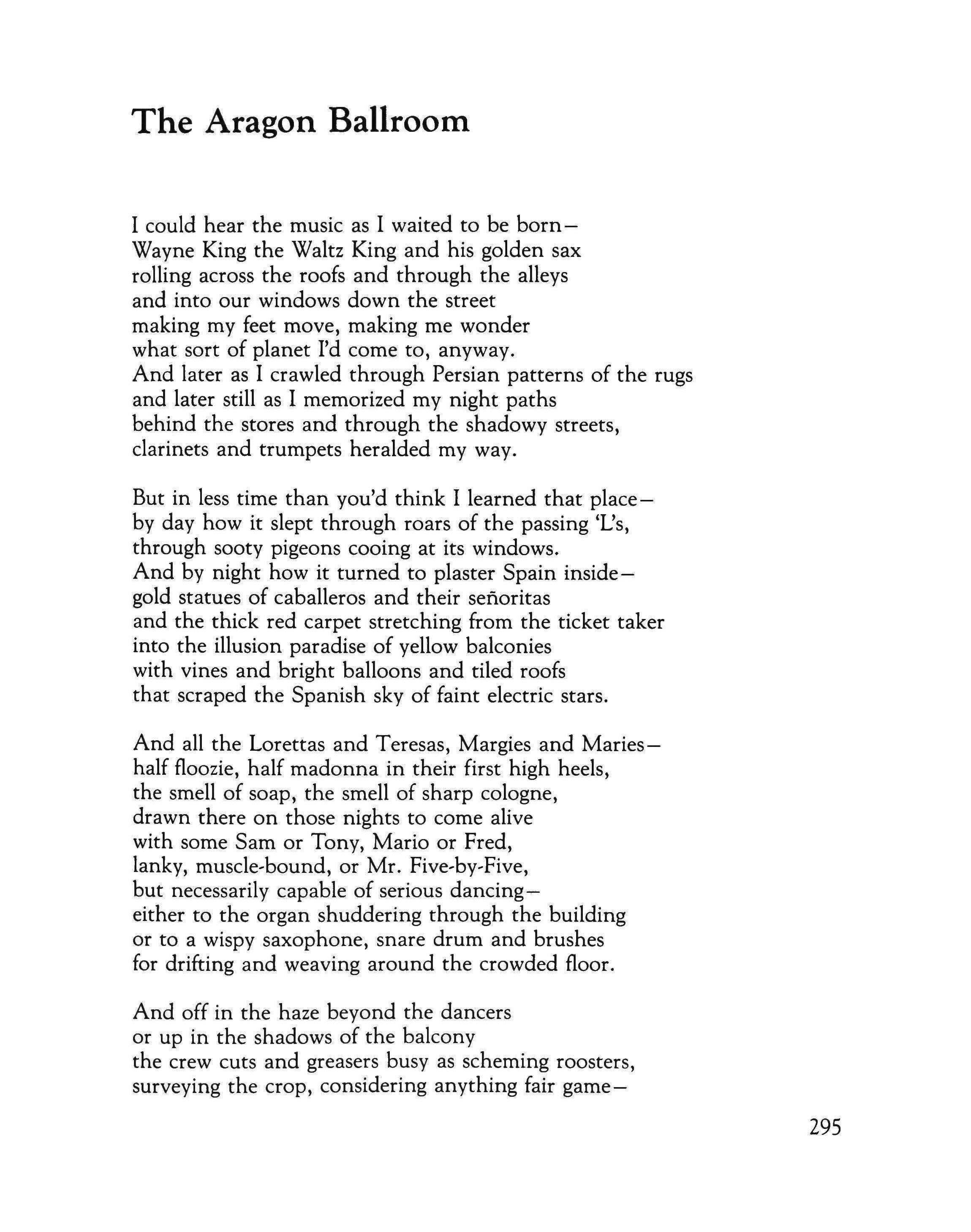
I could hear the music as I waited to be bornWayne King the Waltz King and his golden sax rolling across the roofs and through the alleys and into our windows down the street making my feet move, making me wonder what sort of planet I'd come to, anyway. And later as I crawled through Persian patterns of the rugs and later still as I memorized my night paths behind the stores and through the shadowy streets, clarinets and trumpets heralded my way.
But in less time than you'd think I learned that placeby day how it slept through roars of the passing 'L's, through sooty pigeons cooing at its windows. And by night how it turned to plaster Spain insidegold statues of caballeros and their senoritas and the thick red carpet stretching from the ticket taker into the illusion paradise of yellow balconies with vines and bright balloons and tiled roofs that scraped the Spanish sky of faint electric stars.
And all the Lorettas and Teresas, Margies and Marieshalf floozie, half madonna in their first high heels, the smell of soap, the smell of sharp cologne, drawn there on those nights to come alive with some Sam or Tony, Mario or Fred, lanky, muscle-bound, or Mr. Five-by-Five, but necessarily capable of serious dancingeither to the organ shuddering through the building or to a wispy saxophone, snare drum and brushes for drifting and weaving around the crowded floor. And off in the haze beyond the dancers or up in the shadows of the balcony the crew cuts and greasers busy as scheming roosters, surveying the crop, considering anything fair game-
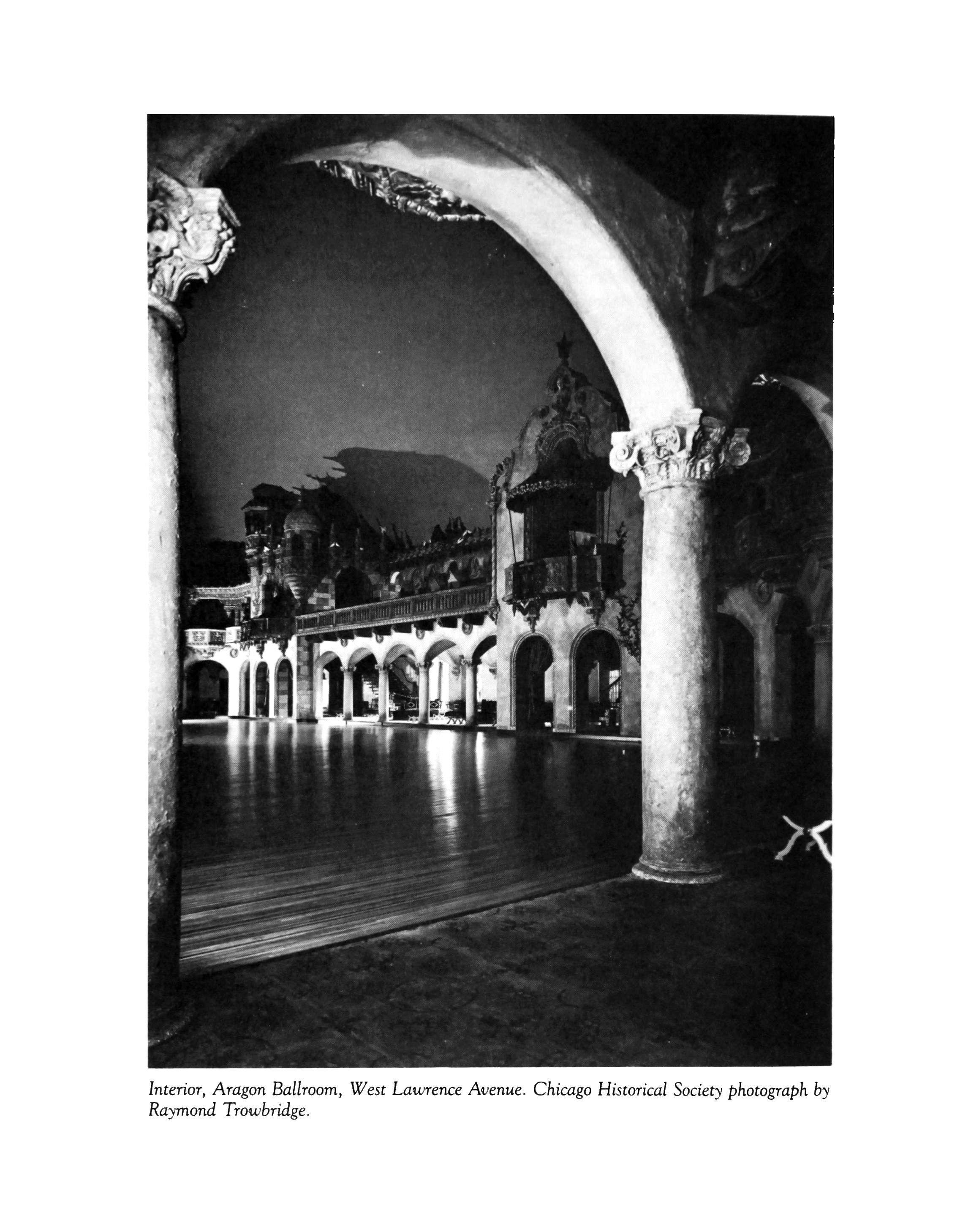 Interior, Aragon Ballroom, West Lawrence Avenue. Chicago Historical Society photograph by Raymond Trowbridge.
Interior, Aragon Ballroom, West Lawrence Avenue. Chicago Historical Society photograph by Raymond Trowbridge.
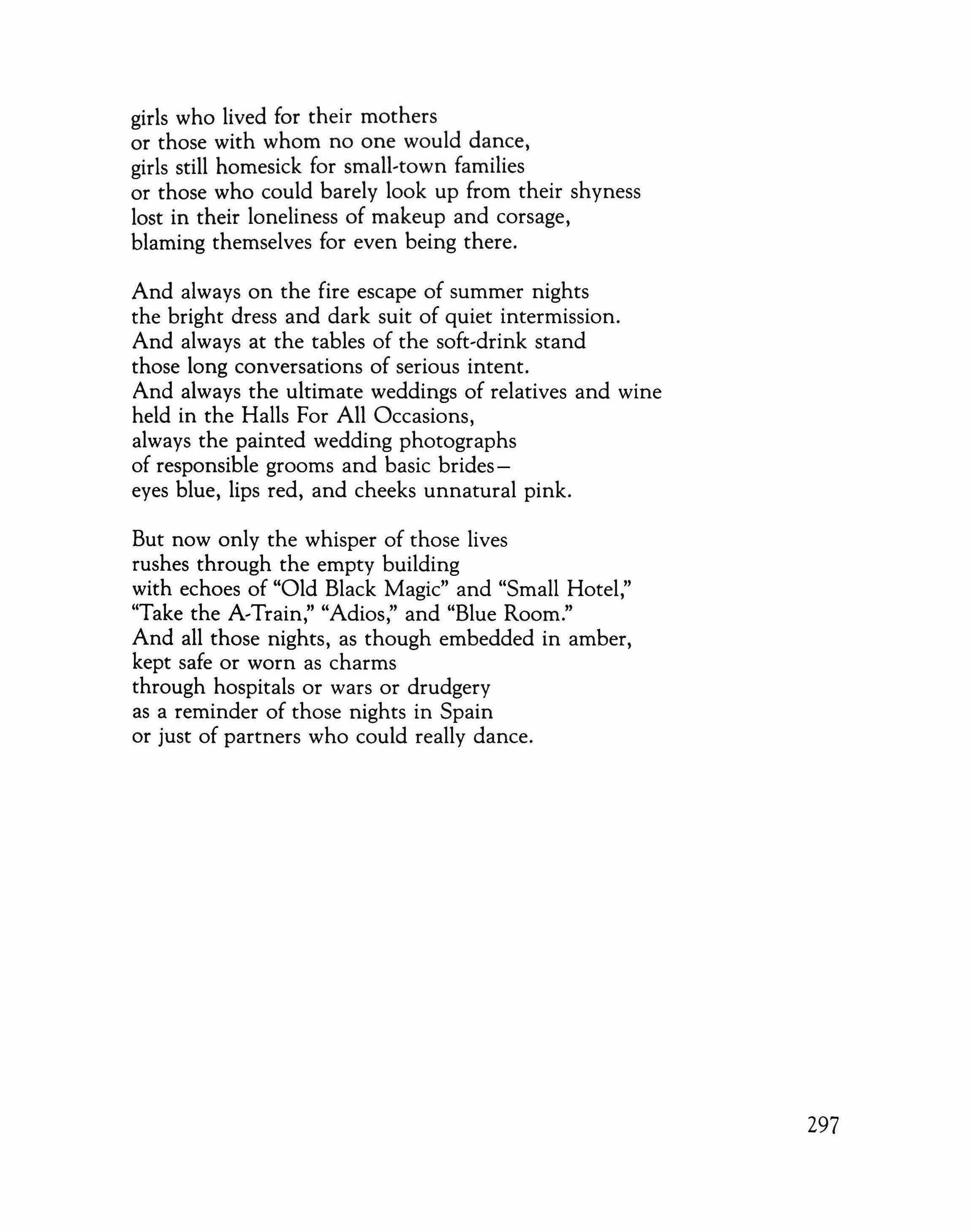
girls who lived for their mothers or those with whom no one would dance, girls still homesick for small-town families or those who could barely look up from their shyness lost in their loneliness of makeup and corsage, blaming themselves for even being there.
And always on the fire escape of summer nights the bright dress and dark suit of quiet intermission. And always at the tables of the soft-drink stand those long conversations of serious intent. And always the ultimate weddings of relatives and wine held in the Halls For All Occasions, always the painted wedding photographs of responsible grooms and basic brideseyes blue, lips red, and cheeks unnatural pink.
But now only the whisper of those lives rushes through the empty building with echoes of "Old Black Magic" and "Small Hotel," "Take the A,Train," "Adios:' and "Blue Room." And all those nights, as though embedded in amber, kept safe or worn as charms through hospitals or wars or drudgery as a reminder of those nights in Spain or just of partners who could really dance.
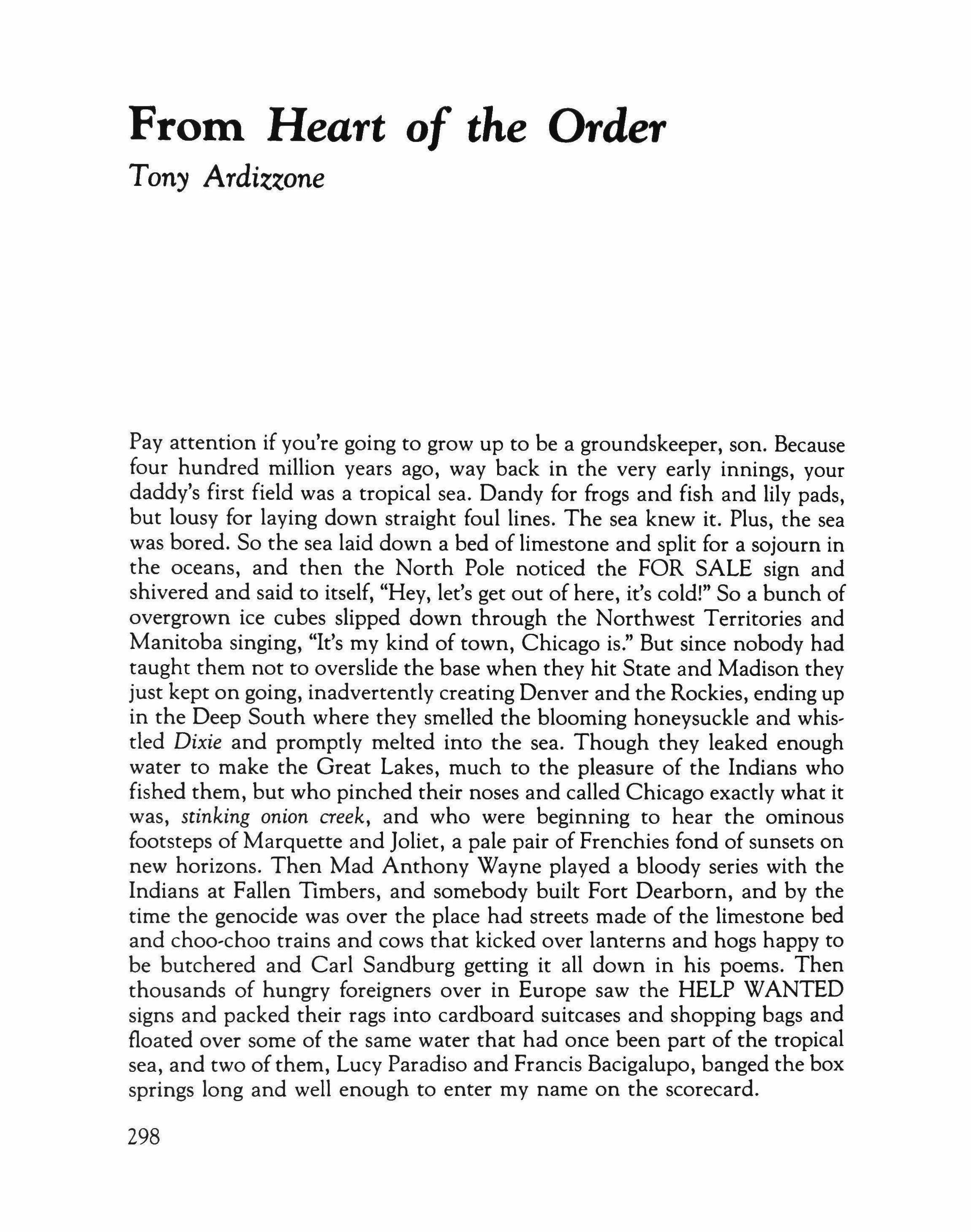
Pay attention if you're going to grow up to be a groundskeeper, son. Because four hundred million years ago, way back in the very early innings, your daddy's first field was a tropical sea. Dandy for frogs and fish and lily pads, but lousy for laying down straight foul lines. The sea knew it. Plus, the sea was bored. So the sea laid down a bed of limestone and split for a sojourn in the oceans, and then the North Pole noticed the FOR SALE sign and shivered and said to itself, "Hey, let's get out of here, it's cold!" So a bunch of overgrown ice cubes slipped down through the Northwest Territories and Manitoba singing, "It's my kind of town, Chicago is." But since nobody had taught them not to overslide the base when they hit State and Madison they just kept on going, inadvertently creating Denver and the Rockies, ending up in the Deep South where they smelled the blooming honeysuckle and whistled Dixie and promptly melted into the sea. Though they leaked enough water to make the Great Lakes, much to the pleasure of the Indians who fished them, but who pinched their noses and called Chicago exactly what it was, stinking onion creek, and who were beginning to hear the ominous footsteps of Marquette and Joliet, a pale pair of Frenchies fond of sunsets on new horizons. Then Mad Anthony Wayne played a bloody series with the Indians at Fallen Timbers, and somebody built Fort Dearborn, and by the time the genocide was over the place had streets made of the limestone bed and choo-choo trains and cows that kicked over lanterns and hogs happy to be butchered and Carl Sandburg getting it all down in his poems. Then thousands of hungry foreigners over in Europe saw the HELP WANTED signs and packed their rags into cardboard suitcases and shopping bags and floated over some of the same water that had once been part of the tropical sea, and two of them, Lucy Paradiso and Francis Bacigalupo, banged the box springs long and well enough to enter my name on the scorecard.
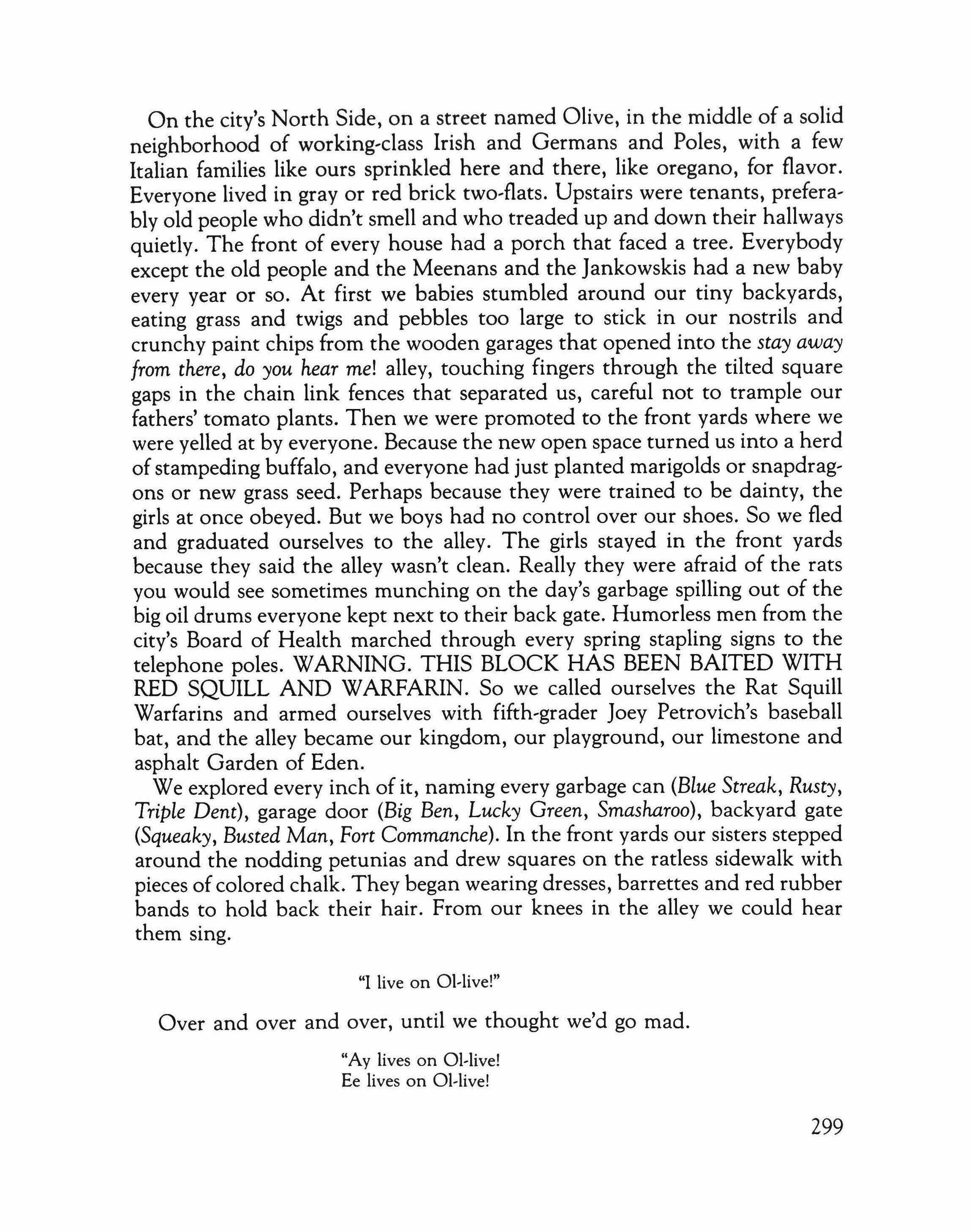
On the city's North Side, on a street named Olive, in the middle of a solid neighborhood of working-class Irish and Germans and Poles, with a few Italian families like ours sprinkled here and there, like oregano, for flavor. Everyone lived in gray or red brick two-flats. Upstairs were tenants, preferably old people who didn't smell and who treaded up and down their hallways quietly. The front of every house had a porch that faced a tree. Everybody except the old people and the Meenans and the Jankowskis had a new baby every year or so. At first we babies stumbled around our tiny backyards, eating grass and twigs and pebbles too large to stick in our nostrils and crunchy paint chips from the wooden garages that opened into the stay away from there, do you hear me! alley, touching fingers through the tilted square gaps in the chain link fences that separated us, careful not to trample our fathers' tomato plants. Then we were promoted to the front yards where we were yelled at by everyone. Because the new open space turned us into a herd of stampeding buffalo, and everyone had just planted marigolds or snapdragons or new grass seed. Perhaps because they were trained to be dainty, the girls at once obeyed. But we boys had no control over our shoes. So we fled and graduated ourselves to the alley. The girls stayed in the front yards because they said the alley wasn't clean. Really they were afraid of the rats you would see sometimes munching on the day's garbage spilling out of the big oil drums everyone kept next to their back gate. Humorless men from the city's Board of Health marched through every spring stapling signs to the telephone poles. WARNING. THIS BLOCK HAS BEEN BAITED WITH RED SQUILL AND WARFARIN. So we called ourselves the Rat Squill Warfarins and armed ourselves with fifth-grader Joey Petrovich's baseball bat, and the alley became our kingdom, our playground, our limestone and asphalt Garden of Eden.
We explored every inch of it, naming every garbage can (Blue Streak, Rusty, Triple Dent), garage door (Big Ben, Lucky Green, Smasharoo), backyard gate (Squeaky, Busted Man, Fort Commanche). In the front yards our sisters stepped around the nodding petunias and drew squares on the ratless sidewalk with pieces ofcolored chalk. They began wearing dresses, barrettes and red rubber bands to hold back their hair. From our knees in the alley we could hear them sing.
"1 live on Ol-live!"
Over and over and over, until we thought we'd go mad. "Ay lives on Ol-livel Ee lives on Ol-live!
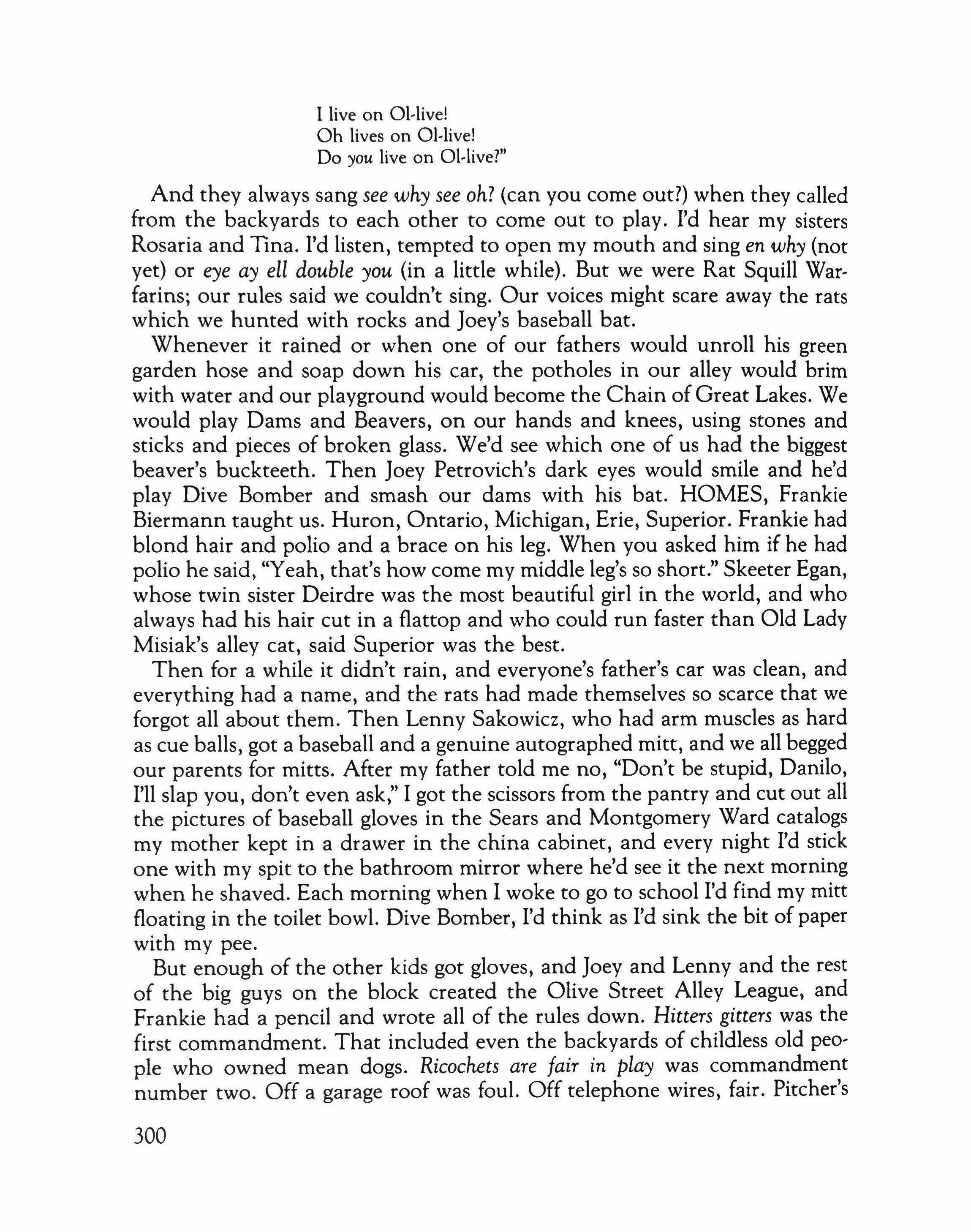
I live on Ol-livel
Oh lives on Ol-livel
Do you live on Ol-livei"
And they always sang see why see oh? (can you come out?) when they called from the backyards to each other to come out to play. I'd hear my sisters Rosaria and Tina. I'd listen, tempted to open my mouth and sing en why (not yet) or eye ay ell double you (in a little while). But we were Rat Squill War, farins; our rules said we couldn't sing. Our voices might scare away the rats which we hunted with rocks and Joey's baseball bat.
Whenever it rained or when one of our fathers would unroll his green garden hose and soap down his car, the potholes in our alley would brim with water and our playground would become the Chain of Great Lakes. We would play Dams and Beavers, on our hands and knees, using stones and sticks and pieces of broken glass. We'd see which one of us had the biggest beaver's buckteeth. Then Joey Petrovich's dark eyes would smile and he'd play Dive Bomber and smash our dams with his bat. HOMES, Frankie Biermann taught us. Huron, Ontario, Michigan, Erie, Superior. Frankie had blond hair and polio and a brace on his leg. When you asked him if he had polio he said, "Yeah, that's how come my middle leg's so short." Skeeter Egan, whose twin sister Deirdre was the most beautiful girl in the world, and who always had his hair cut in a flattop and who could run faster than Old Lady Misiak's alley cat, said Superior was the best.
Then for a while it didn't rain, and everyone's father's car was clean, and everything had a name, and the rats had made themselves so scarce that we forgot all about them. Then Lenny Sakowicz, who had arm muscles as hard as cue balls, got a baseball and a genuine autographed mitt, and we all begged our parents for mitts. After my father told me no, "Don't be stupid, Danilo, I'll slap you, don't even ask," I got the scissors from the pantry and cut out all the pictures of baseball gloves in the Sears and Montgomery Ward catalogs my mother kept in a drawer in the china cabinet, and every night I'd stick one with my spit to the bathroom mirror where he'd see it the next morning when he shaved. Each morning when I woke to go to school I'd find my mitt floating in the toilet bowl. Dive Bomber, I'd think as I'd sink the bit of paper with my pee.
But enough of the other kids got gloves, and Joey and Lenny and the rest of the big guys on the block created the Olive Street Alley League, and Frankie had a pencil and wrote all of the rules down. Hitters giuets was the first commandment. That included even the backyards of childless old people who owned mean dogs. Ricochets are fair in play was commandment number two. Off a garage roof was foul. Off telephone wires, fair. Pitcher's

hands, you're out. Break sornebodv's window and everybody runs, with the hitter responsible for picking up the bat. Joey and the big guys foresaw most of the possibilities. "This here's a league of line-drive sluggers," the big guys said. "Line,drive sluggos," echoed all of us little guys, even Frankie Biermann, whose brace made it awful hard for him to run. Past everybody, even on the bounce, and down the alley-ricochets are fair in play-was an automatic home run.
Mickey Meenan was a real quiet kid, and most of the time he was around you didn't even notice he was there. He was tall for a third-grader, gawky, spotted everywhere you could see with freckles, and he'd pick his earwax with his little finger or a stick and then stare at it for so long he made you ask him what he was going to do with it. "I dunno," he'd always say, and then he'd always eat it or wipe it on his pants leg and then start working on his other ear. All the guys thought he was spoiled because he was an only child. Other than Grace Jankowski, the Borden cow girl, in our neighborhood of mostly Catholic families Mickey was the only only child. Even though he was Catholic his parents sent him to the public school on Bryn Mawr. Mickey's father had a job with the city sleeping in trunks parked along the street where they had big potholes or busted water pipes, and he smoked cigars and liked to shoot birds and rabbits up in Wisconsin and used to be a boxer until he quit before he got cauliflower ears. Mr. Meenan told us all that once. He said he was real happy we played with his kid, and then he grabbed Mickey and rubbed his head real hard with his knuckles. Mickey said nothing, except his face got real red. Mickey had a hundred toys, none of them broken; a thousand comics, none torn. We'd tease him sometimes about eating earwax and being a spoiled mama's boy until he invited all of us over to his house to play with all his junk. Mrs. Meenan made oatmeal cookies and Wyler's lemonade, and Joey and Lenny swiped a bunch of comics, and Frankie fell on a couple of toys and broke them into pieces, and Mr. Meenan laughed and laughed and stunk up the house with his cigar, and everybody but Mickey had a good time.
It was an accident, and it happened before I could even drop the bat and run. Winky Winkler stood on second. Mickey was playing the garage door just behind first. It was a Saturday and we had planned a triple-header, and we were getting good because most of us had our timing down.
Because it was a league of line-drive sluggos.
The ball cracked off the bat and I started to drop it as I ran toward first base, but I heard a hollow squish and Mickey stood there by Lucky Green staring right at me with no expression on his face. Then the world stopped as his bulbs went dim and he fell to his knees. For a millionth of a second I
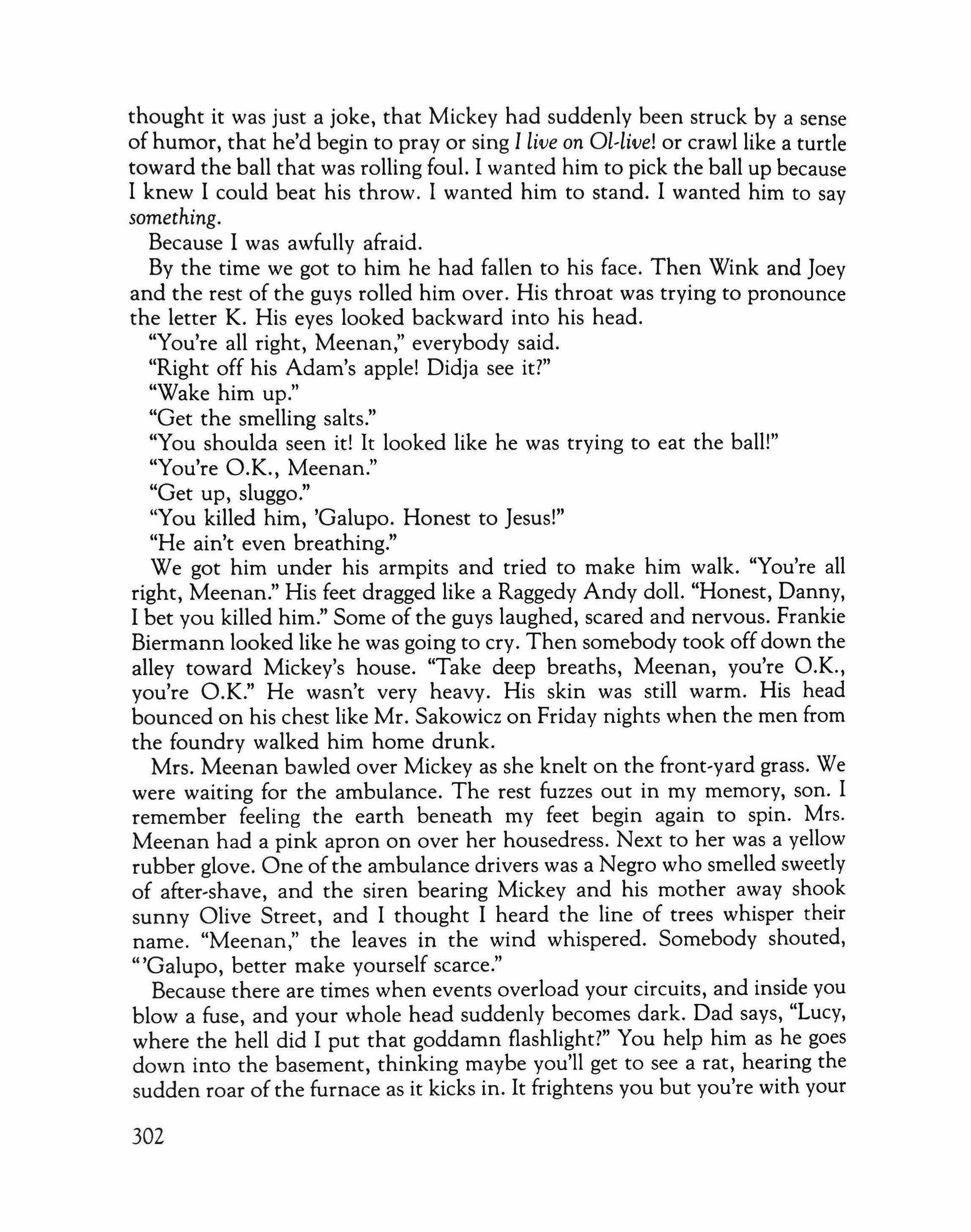
thought it was just a joke, that Mickey had suddenly been struck by a sense of humor, that he'd begin to pray or sing I live on Ol,live! or crawl like a turtle toward the ball that was rolling foul. I wanted him to pick the ball up because I knew I could beat his throw. I wanted him to stand. I wanted him to say something.
Because I was awfully afraid.
By the time we got to him he had fallen to his face. Then Wink and Joey and the rest of the guys rolled him over. His throat was trying to pronounce the letter K. His eyes looked backward into his head.
"You're all right, Meenan," everybody said.
"Right off his Adam's apple! Didja see it?"
"Wake him up."
"Get the smelling salts."
"You shoulda seen it! It looked like he was trying to eat the ball!"
"You're O.K., Meenan."
"Get up, sluggo."
"You killed him, 'Galupo. Honest to Jesus!"
"He ain't even breathing."
We got him under his armpits and tried to make him walk. "You're all right, Meenan." His feet dragged like a Raggedy Andy doll. "Honest, Danny, I bet you killed him." Some of the guys laughed, scared and nervous. Frankie Biermann looked like he was going to cry. Then somebody took off down the alley toward Mickey's house. "Take deep breaths, Meenan, you're O.K., you're O.K." He wasn't very heavy. His skin was still warm. His head bounced on his chest like Mr. Sakowicz on Friday nights when the men from the foundry walked him home drunk.
Mrs. Meenan bawled over Mickey as she knelt on the front-yard grass. We were waiting for the ambulance. The rest fuzzes out in my memory, son. I remember feeling the earth beneath my feet begin again to spin. Mrs. Meenan had a pink apron on over her housedress. Next to her was a yellow rubber glove. One of the ambulance drivers was a Negro who smelled sweetly of after-shave, and the siren bearing Mickey and his mother away shook sunny Olive Street, and I thought I heard the line of trees whisper their name. "Meenan," the leaves in the wind whispered. Somebody shouted, "'Galupo, better make yourself scarce."
Because there are times when events overload your circuits, and inside you blow a fuse, and your whole head suddenly becomes dark. Dad says, "Lucy, where the hell did I put that goddamn flashlight?" You help him as he goes down into the basement, thinking maybe you'll get to see a rat, hearing the sudden roar of the furnace as it kicks in. It frightens you but you're with your

dad. Who says nothing as he shines the flashlight, the only light in the entire world, on the gray metal box.
"Say something to him, Francis."
"Get me a clean shirt. 1 have to shave."
"Again?"
"I can't go over there wearing this filthy shirt."
Supper, some soup and noodles, and nobody talked until Louie started to sniffle, then cry. Mama held Francis Junior and said, "Eat." Only the baby ate, one hand raised and wrapped in Ma's dark curly hair, the other holding her breast so she wouldn't take it away. The rest of us sat around the table, not eating. Louie wiped his tears with the fist that held his spoon. Dominic poked his noodles with his finger. Gino stared at the ceiling, making stupid sounds with his tongue, and Tina held her rubber doll just like Mama held Francis Junior. Rosaria's hands hid her face. 1 looked at them, their dark heads, then down at my soup, then at the little piece of bloodstained toilet paper Dad had sticking to his chin, then at the dishtowel he wore over his immaculate white shirt.
"Francis, there's somebody at the door."
"Answer it, Rosaria."
"They want to talk to Danny."
"Don't just sit there like a dummy. Danilo, go."
Mama thought 1 was asleep when they came back that night. Everybody was in bed. She kissed the others, then touched my forehead with her cool fingertips. I didn't understand why until the middle of the night, when sound-asleep Louie woke me by peeing out his misery against my leg.
Because my forehead now had the mark of Cain, and if I lit a fire its smoke would rush down into the ground. Because I thought that even in darkness my own mother could see it.
I'll have to run away, I thought. With my deficient imagination, I pictured myself as a hobo, no taller than I was then but having a burnt-cork Halloween beard, a stick over my shoulder and all of my belongings inside a red bandanna, riding the EI to the unknown frontier of the South Side, my leg eternally wet with my brother's pee.
They tell me that the next day I did run away, but they offer no details and I can remember none. Of course it became something we didn't talk about, buried along with the other demons and ghosts we never discussed, the hints of which would send your grandfather from the room, make your grandmother's eyes fall to her lap until she barked out an "Eat!" and then steered the ship of safe conversation toward another harbor.
Because for everyone but me it was denied.

Or so I thought, forgetting Mr. Meenan, the man who was wise enough to escape cauliflower ears.
And then I became so sick that the doctor had to quarantine the house. Don't look for causality here, my son. I didn't fall burning with scarlet fever because I murdered Mickey Meenan. I fell ill because when I ran away I inhaled germs, bacteria, streptococci, and a legion of grateful scarlet-fever bees built a hive inside my heart, and their bubbling honey leaked into my bloodstream and sizzled my cheeks and bones and made my guts flame like the open-chested statues you see sometimes ofJesus, and I boiled like a Jonah crab inside the steaming pot of my skin as I thrashed upon the sweaty sheets of my parents' double bed.
The Irish priest wouldn't come because of the quarantine. Ma washed my forehead with holy water she'd stolen from the vestibule. She filled the room with a thousand red votive candles that flickered everywhere I looked twenty-four hours a day, and then the room sprouted dozens of crucifixes, and three times a day my brothers and sisters knelt outside the closed door and recited the rosary and the Litany of the Dead. Oh Lord, deliver them. We beseech Thee, hear us. I ate ice cubes made of water and red wine. I peed when I could into a soup pot. My rna brought every vigil light on the North Side of Chicago into that room, and after each rosary and litany she cracked open the door and made me kiss the feet, hands, side, and head of each of the crucifixes that stood behind the tiers of candles and now covered the four walls and which constantly judged me with the sad half-closed eyelids found only in nursery-rhvme picture books of stupid sheep and on statues and in paintings of the dying Savior.
You'd think I would have lain there in my damp bed and prayed for the eternal salvation of my wretched soul and for eternal rest for the dearly departed Mickey Meenan. You'd think the words I'm sorry, dearest God would have been starters in the lineup on my parched lips. They weren't even on the team. My mind and soul sang a different rumba. "My little sister Tina could have gotten out of the way of that line drive, dear God, so what's the deal, huh, You tell me, why couldn't You have let the spastic catch it? Or at least had him duck? A dog would have known to duck. You could have let it bounce off his head, given him a shiner, busted his nose, knocked out his two front teeth. Why the Adam's apple shot, huh God? Slow day up there? You needed somebody to take real good care of Your hymnbooks? You got some kind of Sacred Holy Earwax You wanted somebody to eat? So maybe You needed him up there with You for a strange and mysterious reason because that's how You work, in strange and mysterious ways, the nuns told me
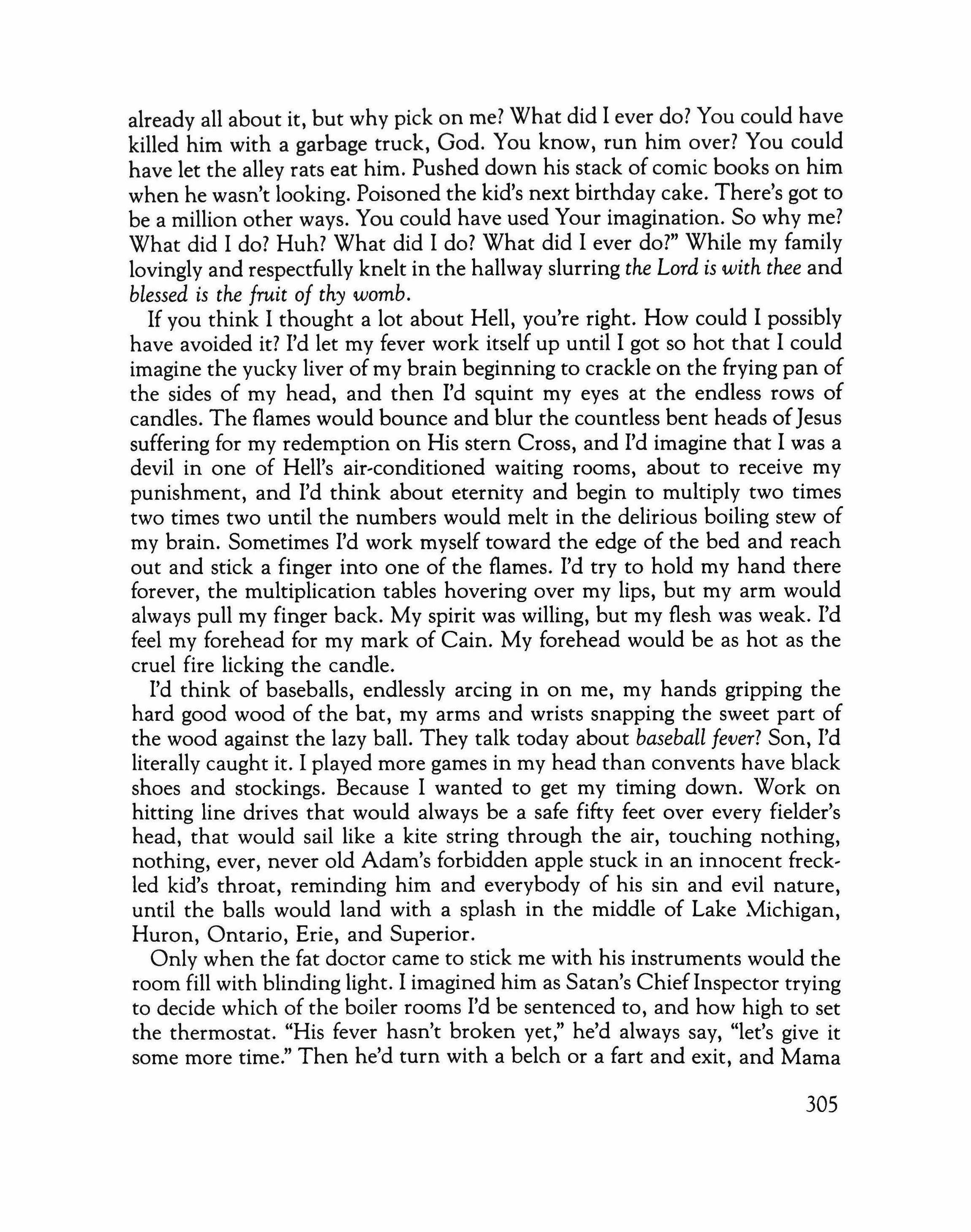
already all about it, but why pick on me? What did I ever do? You could have killed him with a garbage truck, God. You know, run him over? You could have let the alley rats eat him. Pushed down his stack of comic books on him when he wasn't looking. Poisoned the kid's next birthday cake. There's got to be a million other ways. You could have used Your imagination. So why me? What did I do? Huh? What did I do? What did I ever do?" While my family lovingly and respectfully knelt in the hallway slurring the Lord is with thee and blessed is the fruit of thy womb.
If you think I thought a lot about Hell, you're right. How could I possibly have avoided it? I'd let my fever work itself up until I got so hot that I could imagine the yucky liver of my brain beginning to crackle on the frying pan of the sides of my head, and then I'd squint my eyes at the endless rows of candles. The flames would bounce and blur the countless bent heads ofJesus suffering for my redemption on His stern Cross, and I'd imagine that I was a devil in one of Hell's air-conditioned waiting rooms, about to receive my punishment, and I'd think about eternity and begin to multiply two times two times two until the numbers would melt in the delirious boiling stew of my brain. Sometimes I'd work myself toward the edge of the bed and reach out and stick a finger into one of the flames. I'd try to hold my hand there forever, the multiplication tables hovering over my lips, but my arm would always pull my finger back. My spirit was willing, but my flesh was weak. I'd feel my forehead for my mark of Cain. My forehead would be as hot as the cruel fire licking the candle.
I'd think of baseballs, endlessly arcing in on me, my hands gripping the hard good wood of the bat, my arms and wrists snapping the sweet part of the wood against the lazy ball. They talk today about baseball fever? Son, I'd literally caught it. I played more games in my head than convents have black shoes and stockings. Because I wanted to get my timing down. Work on hitting line drives that would always be a safe fifty feet over every fielder's head, that would sail like a kite string through the air, touching nothing, nothing, ever, never old Adam's forbidden apple stuck in an innocent freckled kid's throat, reminding him and everybody of his sin and evil nature, until the balls would land with a splash in the middle of Lake Michigan, Huron, Ontario, Erie, and Superior.
Only when the fat doctor came to stick me with his instruments would the room fill with blinding light. I imagined him as Satan's ChiefInspector trying to decide which of the boiler rooms I'd be sentenced to, and how high to set the thermostat. "His fever hasn't broken yet," he'd always say, "let's give it some more time." Then he'd turn with a belch or a fart and exit, and Mama
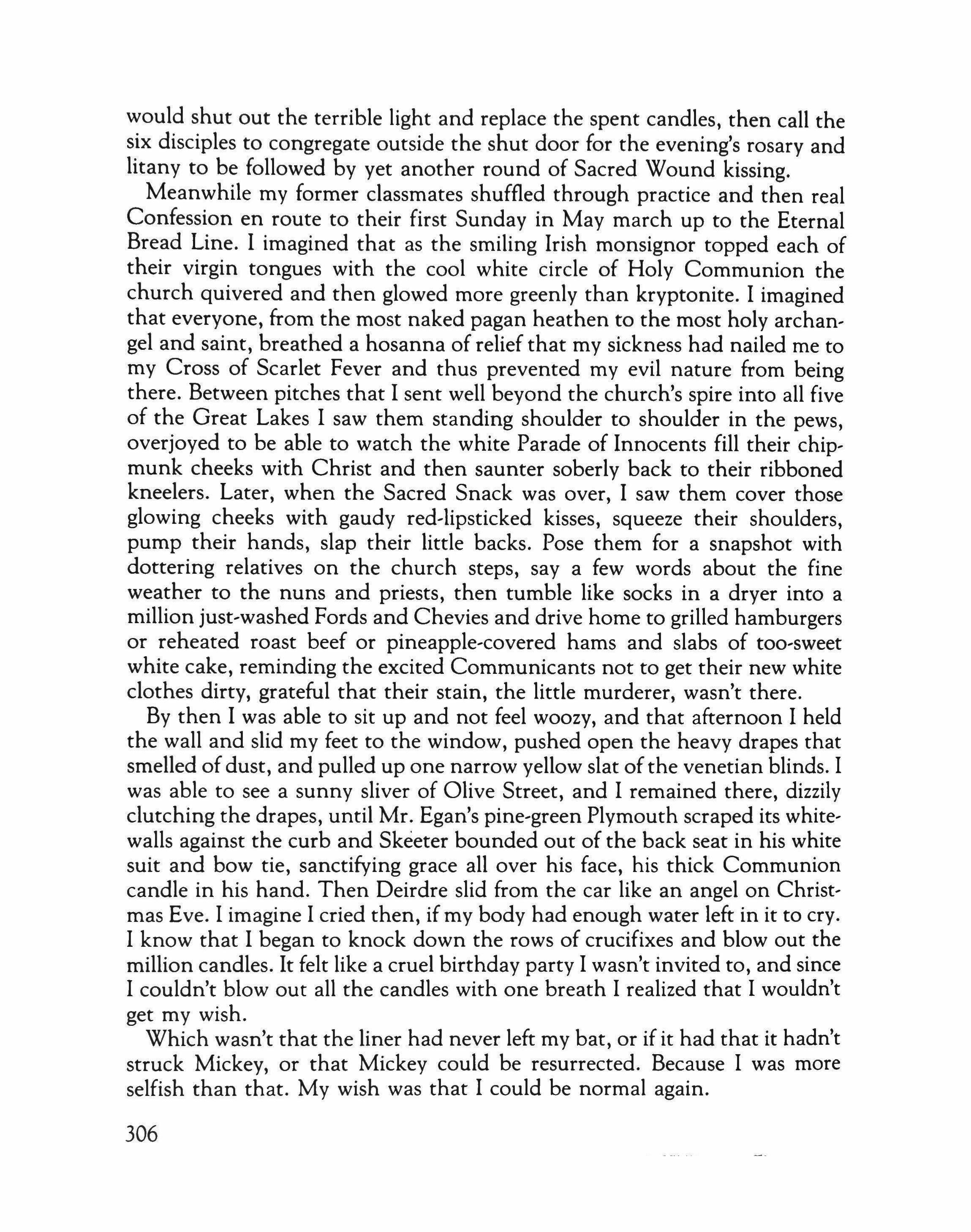
would shut out the terrible light and replace the spent candles, then call the six disciples to congregate outside the shut door for the evening's rosary and litany to be followed by yet another round of Sacred Wound kissing.
Meanwhile my former classmates shuffled through practice and then real Confession en route to their first Sunday in May march up to the Eternal Bread Line. I imagined that as the smiling Irish monsignor topped each of their virgin tongues with the cool white circle of Holy Communion the church quivered and then glowed more greenly than kryptonite. I imagined that everyone, from the most naked pagan heathen to the most holy archangel and saint, breathed a hosanna of relief that my sickness had nailed me to my Cross of Scarlet Fever and thus prevented my evil nature from being there. Between pitches that I sent well beyond the church's spire into all five of the Great Lakes I saw them standing shoulder to shoulder in the pews, overjoyed to be able to watch the white Parade of Innocents fill their chipmunk cheeks with Christ and then saunter soberly back to their ribboned kneelers. Later, when the Sacred Snack was over, I saw them cover those glowing cheeks with gaudy red-lipsticked kisses, squeeze their shoulders, pump their hands, slap their little backs. Pose them for a snapshot with dottering relatives on the church steps, say a few words about the fine weather to the nuns and priests, then tumble like socks in a dryer into a million just-washed Fords and Chevies and drive home to grilled hamburgers or reheated roast beef or pineapple-covered hams and slabs of too-sweet white cake, reminding the excited Communicants not to get their new white clothes dirty, grateful that their stain, the little murderer, wasn't there.
By then I was able to sit up and not feel woozy, and that afternoon I held the wall and slid my feet to the window, pushed open the heavy drapes that smelled of dust, and pulled up one narrow yellow slat ofthe venetian blinds. I was able to see a sunny sliver of Olive Street, and I remained there, dizzily clutching the drapes, until Mr. Egan's pine-green Plymouth scraped its whitewalls against the curb and Skeeter bounded out of the back seat in his white suit and bow tie, sanctifying grace all over his face, his thick Communion candle in his hand. Then Deirdre slid from the car like an angel on Christmas Eve. I imagine I cried then, if my body had enough water left in it to cry. I know that I began to knock down the rows of crucifixes and blowout the million candles. It felt like a cruel birthday party I wasn't invited to, and since I couldn't blowout all the candles with one breath I realized that I wouldn't get my wish.
Which wasn't that the liner had never left my bat, or if it had that it hadn't struck Mickey, or that Mickey could be resurrected. Because I was more selfish than that. My wish was that I could be normal again.

Because I'd seen what happened to the kids who weren't. The others ganged up on them like a school of pet-store piranhas and nibbled at their heels until they were barely alive. They tripped you whenever you tried to walk down their row. They stuck KICK ME I'M AN ASSHOLE signs on your back with chewing gum, pushed closed one nostril and snotted out a gob ofboogers on your seat and then hooted like hyenas when you sat in it, hid Tootsie Rolls of dog shit in your desk, trickled half-full cartons of chocolate milk over your head and said it was a nigger baptism. They gave you a nickname like Junky or B. O. or Dick Lick, then taunted you with it when, ever you had the stupidity to come near. No one would sit with you in the lunchroom, play with you on the playground, stand next to you as you waited in line. They said you wore black loafers, and speaking ofblack loafers how were your parents? They said that was a filthy crack, and speaking of filthy cracks how's your rna? A low blow, how's your little sister? They said your looks and brains must have dripped down your old lady's legs.
So I blew out everyone of the damn candles and kicked over the soup pot and then got up on a chair so I could take all the crucifixes down from the wall when my rna came in and screamed, "Francis, Gino, Dominic, Rosaria, Tina, Louie, Francis Junior! Thank God! Our prayers are answered! Danny's well!"
And I was.
Even the next month when I watched the huge moving van flatten Mrs. Jankowski's petunia bed and then carryall the Meenan's stuff down their front steps onto the back of the truck. Even when I smelled Mr. Meenan's cigar and then heard him behind me saying, "You just wait, Kiddo, you little son of a bitch." Even when I carried out the garbage and then went into the alley and found the precise spot where I'd murdered Mickey and a lightning bolt didn't streak from the sky. Even when I went back to school and sat in my old desk, inhaling the deliciously complex aroma of industrial-strength floor cleaner and chalk dust, each of my books in a new chapter.
Though you'd think I was the scabbiest leper in the movie about Saint Damien. When I walked down the hallways everyone, I mean everyone, gave me room. Even Mother Superior and the old janitor who played solitaire in the mop closet and all the ladies in hairnets who helped out in the cafeteria. When I sat down and opened my lunch bag the whole table shut up more quickly than had the Pope himself come into the room. None of the girls would look into my eyes. Out on the playground I'd be able to join any game, even sixth-graders' games, and nobody ever tried to tag me in tag, foul me in basketball, run faster than I could run in any footrace. The nuns gave me straight Ns in Conduct, B's and Ns in everything else. Anything I ever
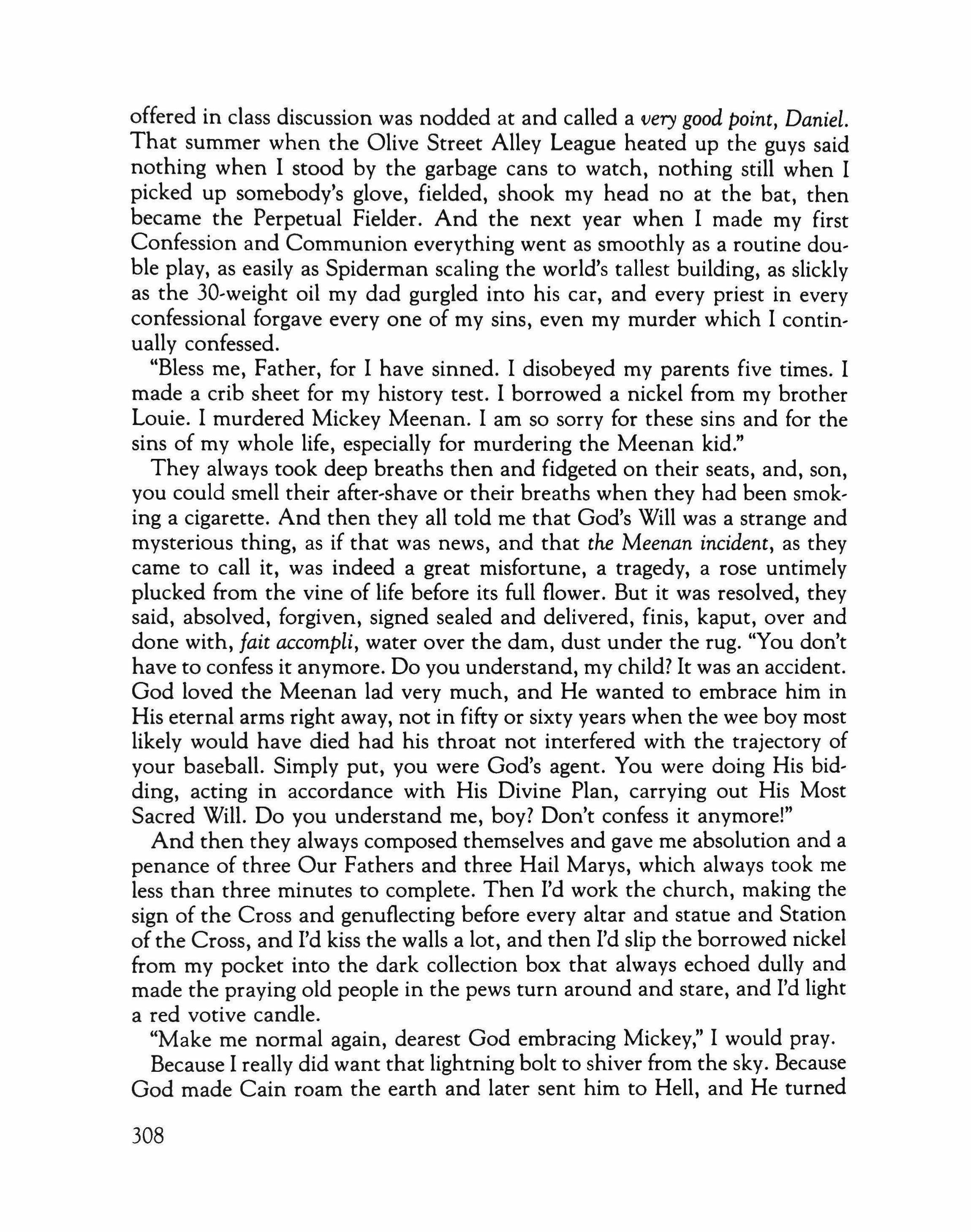
offered in class discussion was nodded at and called a very good point, Daniel. That summer when the Olive Street Alley League heated up the guys said nothing when I stood by the garbage cans to watch, nothing still when I picked up somebody's glove, fielded, shook my head no at the bat, then became the Perpetual Fielder. And the next year when I made my first Confession and Communion everything went as smoothly as a routine double play, as easily as Spiderman scaling the world's tallest building, as slickly as the 30�weight oil my dad gurgled into his car, and every priest in every confessional forgave everyone of my sins, even my murder which I continually confessed.
"Bless me, Father, for I have sinned. I disobeyed my parents five times. I made a crib sheet for my history test. I borrowed a nickel from my brother Louie. I murdered Mickey Meenan. I am so sorry for these sins and for the sins of my whole life, especially for murdering the Meenan kid."
They always took deep breaths then and fidgeted on their seats, and, son, you could smell their after-shave or their breaths when they had been smoking a cigarette. And then they all told me that God's Will was a strange and mysterious thing, as if that was news, and that the Meenan incident, as they came to call it, was indeed a great misfortune, a tragedy, a rose untimely plucked from the vine of life before its full flower. But it was resolved, they said, absolved, forgiven, signed sealed and delivered, finis, kaput, over and done with, fait accompli, water over the dam, dust under the rug. "You don't have to confess it anymore. Do you understand, my child? It was an accident. God loved the Meenan lad very much, and He wanted to embrace him in His eternal arms right away, not in fifty or sixty years when the wee boy most likely would have died had his throat not interfered with the trajectory of your baseball. Simply put, you were God's agent. You were doing His bidding, acting in accordance with His Divine Plan, carrying out His Most Sacred Will. Do you understand me, boy? Don't confess it anymore!"
And then they always composed themselves and gave me absolution and a penance of three Our Fathers and three Hail Marys, which always took me less than three minutes to complete. Then I'd work the church, making the sign of the Cross and genuflecting before every altar and statue and Station ofthe Cross, and I'd kiss the walls a lot, and then I'd slip the borrowed nickel from my pocket into the dark collection box that always echoed dully and made the praying old people in the pews turn around and stare, and I'd light a red votive candle.
"Make me normal again, dearest God embracing Mickey," I would pray. Because I really did want that lightning bolt to shiver from the sky. Because God made Cain roam the earth and later sent him to Hell, and He turned

Lot's wife into a giant salt lick, and when Moses gave the rock an extra tap God wouldn't let him into the Promised Land. Because when you play Monopoly and go bankrupt the others should toss your Scottish terrier from the board, not give you loans. Because after three strikes no matter if you're Lou Gehrig or Ted Williams you're out of there. And God rained fire on Sodom and Gomorrah, and Jesus got pee-ohed at the money-makers in the temple and threw them out on their ears, and after they crowned Him with the rosebush and drove the spear into His side He died. No miracles. No ignoring it. Three fat red hotels on Park Place. Jesus gave up His ghost and died.
So I knew I had it coming. If not today, tomorrow.
If you got eternally punished, I figured, for eating some fruit God told you not to eat or for turning around to look at a couple of burning cities or for tapping a rock just for luck, think of what was waiting for you if you smashed a hot line drive off a dumb kid's Adam's apple and murdered him!
And I figured that eventually the cops would come back. Reopen the case, smell something fishy. By then I'd been to the movies, and Aunt Lena had her own TV. I knew the flatfeet always got you, even if you were as tough as Edward G. Robinson in Little Caesar. He made me look like a Hostess Ding Dong. I'd seen Dragnet. The two cops who came to the house that night were just like them, real polite, wiping their shoes in the front hall and taking off their hats, while everybody else ate soup and noodles in the kitchen and my rna and dad worried about having to go over to Mickey's house where they'd sit and not know what to say.
"Maybe we should bring them something, Lucy? A bottle of wine?"
"Francis, we'll bring them our pity and beg their forgiveness."
I sat in the front room and answered their questions, just for the record, son, sorry about this, we know what you must be feeling but see we got these reports, and I told them all about the Alley League and was running down the ground rules when they interrupted.
"Did you mean to hurt him, Danny?"
The answer popped out without my thinking; "No."
"That's all we came to hear."
So they left, not speaking to me, like the rest. And the shadow of my dad's thick shoulders stretched toward me down the hallway as he stood from the table and sighed, and my mother's thin silhouette eclipsed the light bulb hanging in the kitchen. Their whispers hissed down the long hall. But there was more to hear! When I swung the bat I did mean to murder something! The ball and what I was, to send both so far up the alley that all the kids would drop their gloves and cheer, and Ma would ignore the goddamn
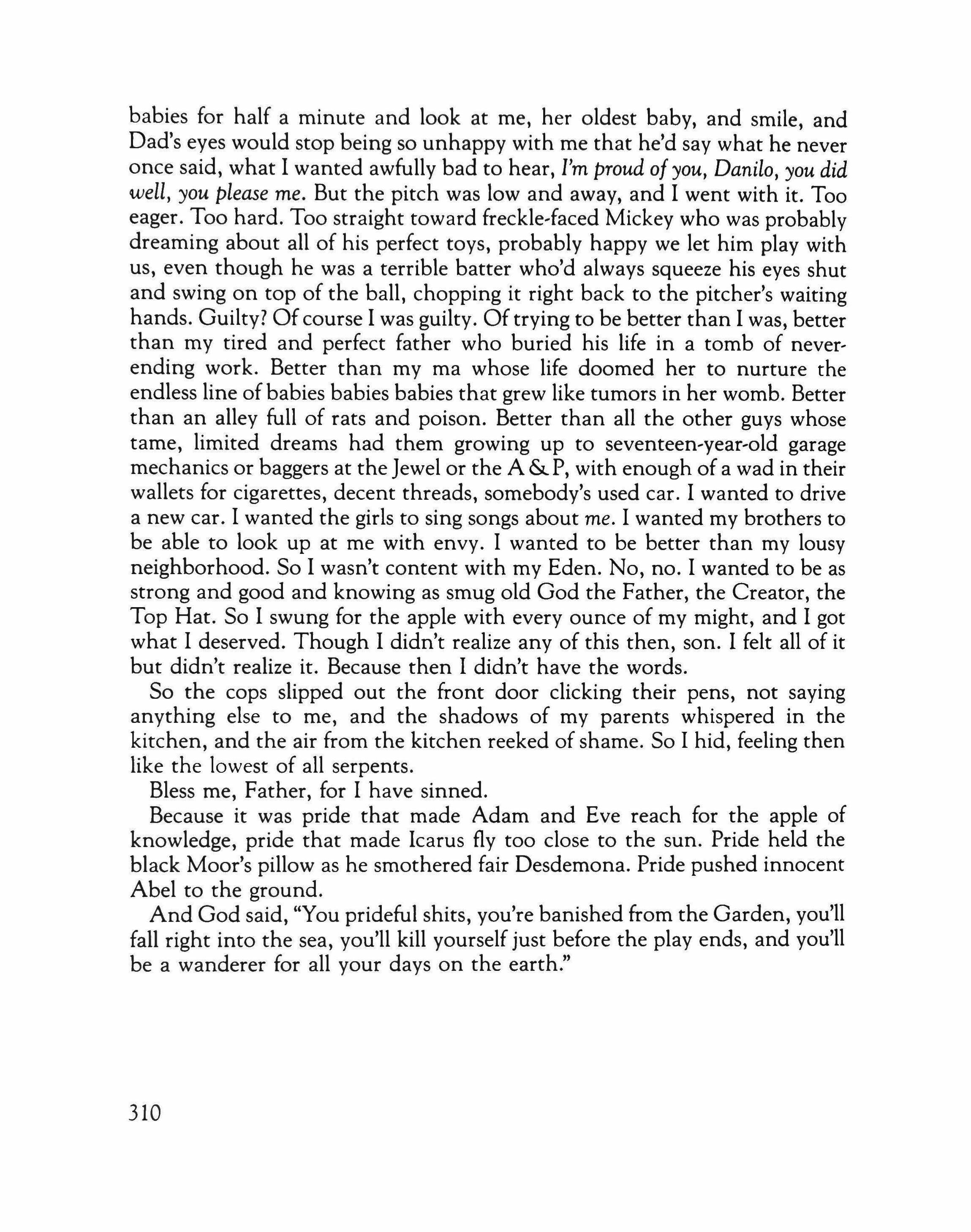
babies for half a minute and look at me, her oldest baby, and smile, and Dad's eyes would stop being so unhappy with me that he'd say what he never once said, what I wanted awfully bad to hear, I'm proud of you, Danilo, you did well, you please me. But the pitch was low and away, and I went with it. Too eager. Too hard. Too straight toward freckle-faced Mickey who was probably dreaming about all of his perfect toys, probably happy we let him play with us, even though he was a terrible batter who'd always squeeze his eyes shut and swing on top of the ball, chopping it right back to the pitcher's waiting hands. Guilty? Of course I was guilty. Of trying to be better than I was, better than my tired and perfect father who buried his life in a tomb of never, ending work. Better than my rna whose life doomed her to nurture the endless line ofbabies babies babies that grew like tumors in her womb. Better than an alley full of rats and poison. Better than all the other guys whose tame, limited dreams had them growing up to seventeen-year-old garage mechanics or baggers at the Jewel or the A & P, with enough of a wad in their wallets for cigarettes, decent threads, somebody's used car. I wanted to drive a new car. I wanted the girls to sing songs about me. I wanted my brothers to be able to look up at me with envy. I wanted to be better than my lousy neighborhood. So I wasn't content with my Eden. No, no. I wanted to be as strong and good and knowing as smug old God the Father, the Creator, the Top Hat. So I swung for the apple with every ounce of my might, and I got what I deserved. Though I didn't realize any of this then, son. I felt all of it but didn't realize it. Because then I didn't have the words.
So the cops slipped out the front door clicking their pens, not saying anything else to me, and the shadows of my parents whispered in the kitchen, and the air from the kitchen reeked of shame. So I hid, feeling then like the lowest of all serpents.
Bless me, Father, for I have sinned.
Because it was pride that made Adam and Eve reach for the apple of knowledge, pride that made Icarus fly too close to the sun. Pride held the black Moor's pillow as he smothered fair Desdemona. Pride pushed innocent Abel to the ground.
And God said, "You prideful shits, you're banished from the Garden, you'll fall right into the sea, you'll kill yourselfjust before the play ends, and you'll be a wanderer for all your days on the earth."

In the end, Jesse knows, it'll all come down to a kiss-off, Always does, always will. It's the thing about being captain that bums him most. Whoever gets first pick by winning the chin-up also has to decide who gets picked last. The right to take Ndele or Maggie or Dougie, in other words, also forces you to say who's the dufus, the megadork, the absolute scuzziest player. God.
Jesse extends the upside-down Aaron at Maggie, who's captaining this morning for Stuart, who's home sick with flu. Maggie covers the label with her tan veiny fist: she obviously knows what she's doing. It feels kind of strange, though, to Jesse, especially the way the soft meaty part of her palm is pressing down warm on his thumb. It feels good.
He places his other fist over Maggie's, Maggie places hers over his, and they stare at each other: two gawky ducklings, bony and taut, both of them much, much too tall for their ages, but cute. And Maggie is taller, which just drives Jesse nuts, even if it's not by that much. The one girl in school doesn't make him wanna start heaving and she has to go be this big gonzo sucker you gotta look up just to look at her. Jeez.
There are six inches left on the bat. Jesse lets go with his bottom hand, taking the opportunity to dry that palm off on his jeans, then places a (legal) three-fingered fist upside down over Maggie's, leaving his pinkie stuck side, ways like some sort of stretched-out square-root sign. O.K. About half of his classmates look on with interest, galvanized even, popping their sugarless gum: at which point will they get selected? The rest could care less.
Maggie stares long and hard at what's left of the Aaron, gauging her tactical options: three fingers, two, or a wedgie. Is it possible she might even try for a claw now? Who knows.
Another eight seconds go by.
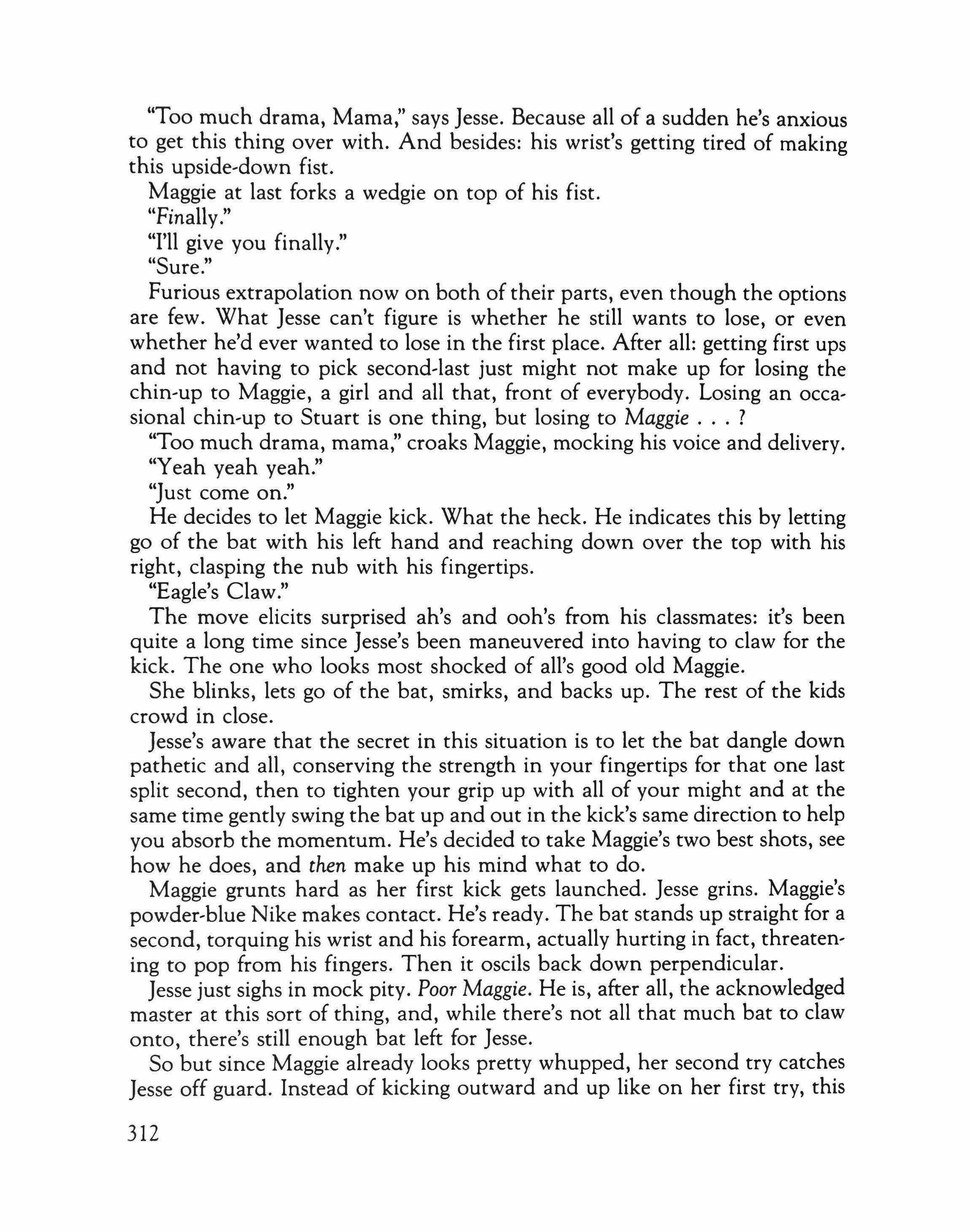
"Too much drama, Mama," says Jesse. Because all of a sudden he's anxious to get this thing over with. And besides: his wrist's getting tired of making this upside-down fist.
Maggie at last forks a wedgie on top of his fist.
"Finally."
"I'll give you finally." "Sure."
Furious extrapolation now on both of their parts, even though the options are few. What Jesse can't figure is whether he still wants to lose, or even whether he'd ever wanted to lose in the first place. After all: getting first ups and not having to pick second-last just might not make up for losing the chin-up to Maggie, a girl and all that, front of everybody. Losing an occasional chin-up to Stuart is one thing, but losing to Maggie ?
"Too much drama, mama," croaks Maggie, mocking his voice and delivery. "Yeah yeah yeah."
"Just come on."
He decides to let Maggie kick. What the heck. He indicates this by letting go of the bat with his left hand and reaching down over the top with his right, clasping the nub with his fingertips.
"Eagle's Claw."
The move elicits surprised ah's and ooh's from his classmates: it's been quite a long time since Jesse's been maneuvered into having to claw for the kick. The one who looks most shocked of all's good old Maggie.
She blinks, lets go of the bat, smirks, and backs up. The rest of the kids crowd in close.
Jesse's aware that the secret in this situation is to let the bat dangle down pathetic and all, conserving the strength in your fingertips for that one last split second, then to tighten your grip up with all of your might and at the same time gently swing the bat up and out in the kick's same direction to help you absorb the momentum. He's decided to take Maggie's two best shots, see how he does, and then make up his mind what to do.
Maggie grunts hard as her first kick gets launched. Jesse grins. Maggie's powder-blue Nike makes contact. He's ready. The bat stands up straight for a second, torquing his wrist and his forearm, actually hurting in fact, threatening to pop from his fingers. Then it oscils back down perpendicular.
Jesse just sighs in mock pity. POOT Maggie. He is, after all, the acknowledged master at this sort of thing, and, while there's not all that much bat to claw onto, there's still enough bat left for Jesse.
So but since Maggie already looks pretty whupped, her second try catches Jesse off guard. Instead of kicking outward and up like on her first try, this
312

time she gives it a quick straight karate-style chop. Jesse's knuckles turn white as he tries to hold on - but, somehow or other, he does.
"No contest," he says, stifling this enormous fake yawn. "I mean, it's a h"rrusmatc
Maggie Bronx cheers him - he can actually feel the spray on his lips - then suggests that he go bag his face. It looks like she's just about to flip him off too, either that or break down and start crying. In the end she does neither.
Her final kick's downright vicious, in fact, which in a way is real lucky for Jesse. If she had broken down, or just gave the bat some halfhearted tap, there's no way he'd've been able to tank it.
As it is, he suddenly finds that the Aaron's been yanked from his fingers and is whanging end over end through the air, scattering classmates, clanging into the side of the backstop. It drops to the ground with a thud. It's impossible for Jesse to tell whether it was the humungous kick Maggie just gave it that did it or if he'd been able to accidentally-on-purpose let go after all.
Either way, his classmates are whooping and pounding their gloves in approval. The girls in particular are whistling and partying down. Ndele and Dougie look stunned.
Jesse does his best to look bummed: it's not all that hard. At the same time, however, he tries to include in his expression at least the hint of the possibility that maybe, just maybe, he might've let go on purpose. He looks over quickly at Maggie, trying to establish some eye contact, to charm her somehow, hoping she'll see things his way.
Maggie's not buying it. And besides: she's too busy anyway receiving backslaps and fives, mostly from the rest ofthe girls. (Is it possible that, in her exuberance, she'd actually pick one of them before Ndele or Dougie or Gill?)
In the meantime Jesse's toted up the number of available players: counting Maggie and him, seventeen. So. He not only loses the chin-up, but he still has to pick second-last. Is he ready for that? He can't say. He fingers the pimple or two on his chin, then brushes the side of his hand up his cheek. It pleases him now to be actually able to hear the response of the small patch of flimsy blond whiskers. Coefficient of friction, he thinks. Or something like that.
Maggie finally looks over at him. She's ready to pick. She looks beautiful. Jesse looks up at the sky. There's a chevron of geese flying by, headed north, but nobody seems to've noticed but him.
"Dougie," says Maggie, pounding her glove. "I take Dougie."
"Ready?"
"You ready?"
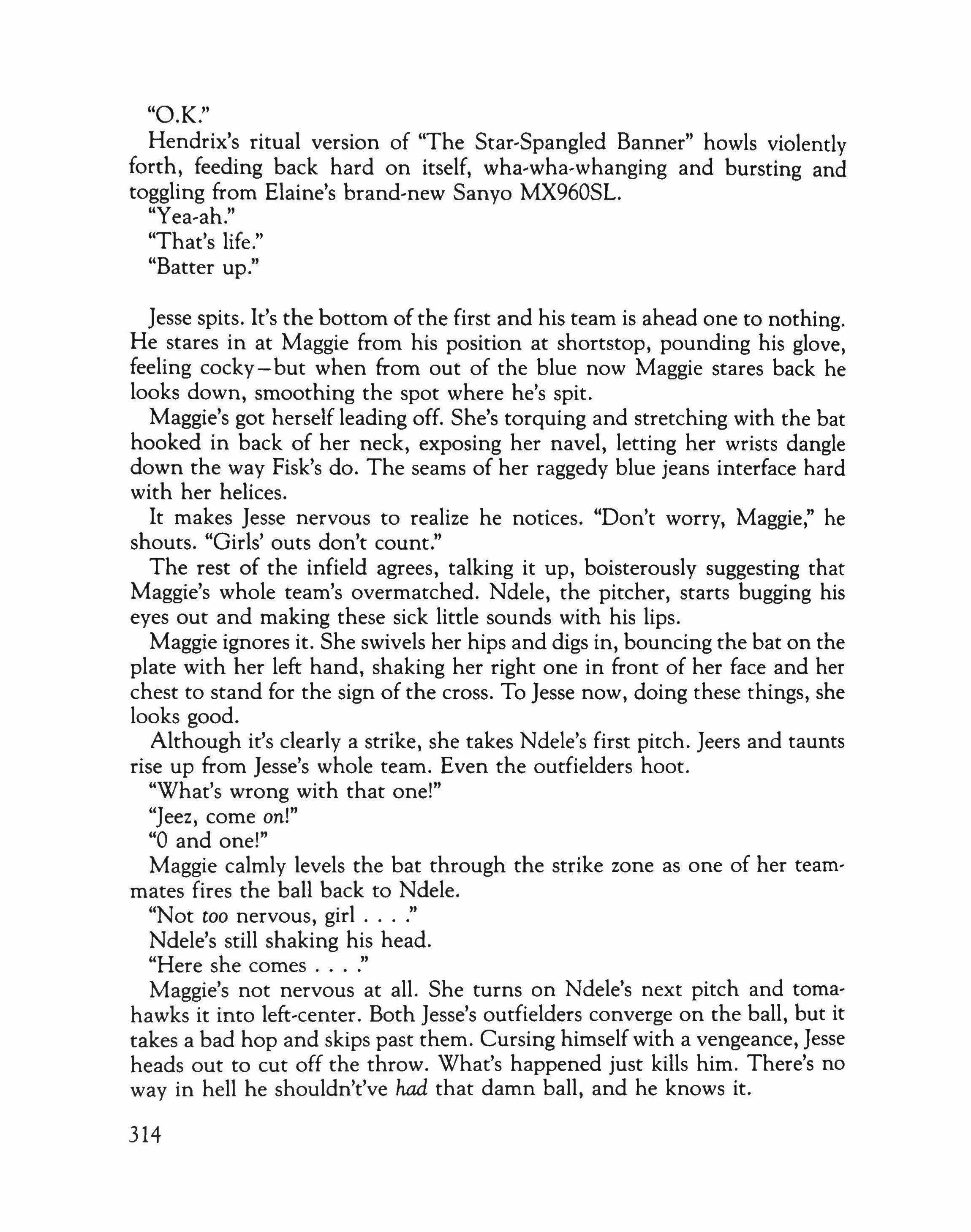
"O.K."
Hendrix's ritual version of "The Star-Spangled Banner" howls violently forth, feeding back hard on itself, wha-wha-whanging and bursting and toggling from Elaine's brand-new Sanyo MX960SL.
"Yea,ah."
"That's life."
"Batter up."
Jesse spits. It's the bottom of the first and his team is ahead one to nothing. He stares in at Maggie from his position at shortstop, pounding his glove, feeling cocky-but when from out of the blue now Maggie stares back he looks down, smoothing the spot where he's spit.
Maggie's got herself leading off. She's torquing and stretching with the bat hooked in back of her neck, exposing her navel, letting her wrists dangle down the way Fisk's do. The seams of her raggedy blue jeans interface hard with her helices.
It makes Jesse nervous to realize he notices. "Don't worry, Maggie," he shouts. "Girls' outs don't count."
The rest of the infield agrees, talking it up, boisterously suggesting that Maggie's whole team's overmatched. Ndele, the pitcher, starts bugging his eyes out and making these sick little sounds with his lips.
Maggie ignores it. She swivels her hips and digs in, bouncing the bat on the plate with her left hand, shaking her right one in front of her face and her chest to stand for the sign of the cross. To Jesse now, doing these things, she looks good.
Although it's clearly a strike, she takes Ndele's first pitch. Jeers and taunts rise up from Jesse's whole team. Even the outfielders hoot.
"What's wrong with that one!"
"[eez, come on!"
"0 and one!"
Maggie calmly levels the bat through the strike zone as one of her team' mates fires the ball back to Ndele.
"Not too nervous, girl "
Ndele's still shaking his head.
"Here she comes ."
Maggie's not nervous at all. She turns on Ndele's next pitch and tomahawks it into left-center. Both Jesse's outfielders converge on the ball, but it takes a bad hop and skips past them. Cursing himself with a vengeance, Jesse heads out to cut off the throw. What's happened just kills him. There's no way in hell he shouldn't've had that damn ball, and he knows it.
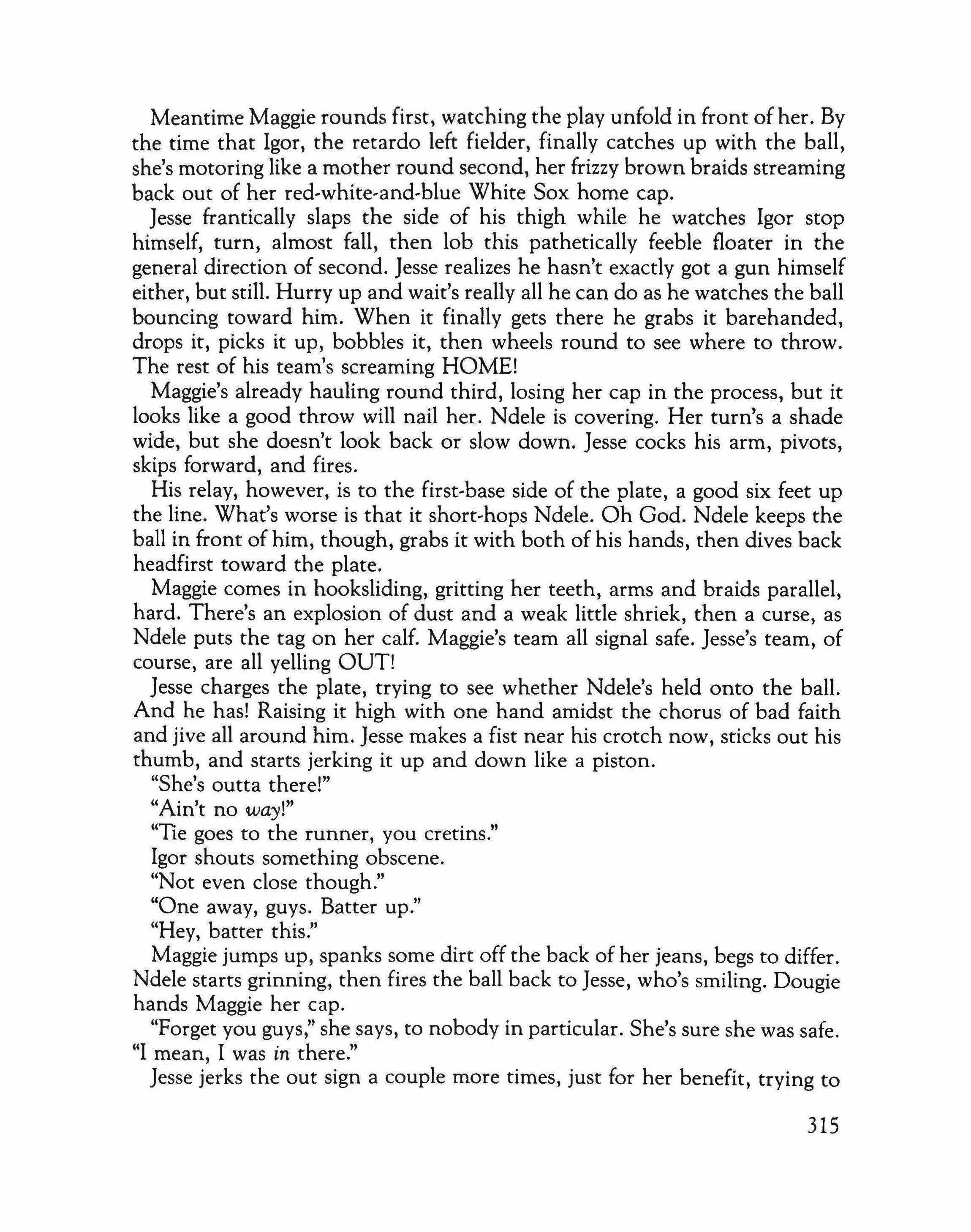
Meantime Maggie rounds first, watching the play unfold in front of her. By the time that Igor, the retardo left fielder, finally catches up with the ball, she's motoring like a mother round second, her frizzy brown braids streaming back out of her red-white-and-blue White Sox home cap.
Jesse frantically slaps the side of his thigh while he watches Igor stop himself, turn, almost fall, then lob this pathetically feeble floater in the general direction of second. Jesse realizes he hasn't exactly got a gun himself either, but still. Hurry up and wait's really all he can do as he watches the ball bouncing toward him. When it finally gets there he grabs it barehanded, drops it, picks it up, bobbles it, then wheels round to see where to throw. The rest of his team's screaming HOME!
Maggie's already hauling round third, losing her cap in the process, but it looks like a good throw will nail her. Ndele is covering. Her turn's a shade wide, but she doesn't look back or slow down. Jesse cocks his arm, pivots, skips forward, and fires.
His relay, however, is to the first-base side of the plate, a good six feet up the line. What's worse is that it short,hops Ndele. Oh God. Ndele keeps the ball in front of him, though, grabs it with both of his hands, then dives back headfirst toward the plate.
Maggie comes in hooksliding, gritting her teeth, arms and braids parallel, hard. There's an explosion of dust and a weak little shriek, then a curse, as Ndele puts the tag on her calf. Maggie's team all signal safe. Jesse's team, of course, are all yelling OUT!
Jesse charges the plate, trying to see whether Ndele's held onto the ball. And he has! Raising it high with one hand amidst the chorus of bad faith and jive all around him. Jesse makes a fist near his crotch now, sticks out his thumb, and starts jerking it up and down like a piston.
"She's outta there!"
"Ain't no way!"
"Ti h ie goes to t e runner, you crenns.
Igor shouts something obscene.
"Not even close though."
"One away, guys. Batter up."
"Hey, batter this."
Maggie jumps up, spanks some dirt off the back of her jeans, begs to differ. Ndele starts grinning, then fires the ball back to Jesse, who's smiling. Dougie hands Maggie her cap.
"Forget you guys," she says, to nobody in particular. She's sure she was safe. "I mean, I was in there."
Jesse jerks the out sign a couple more times, just for her benefit, trying to
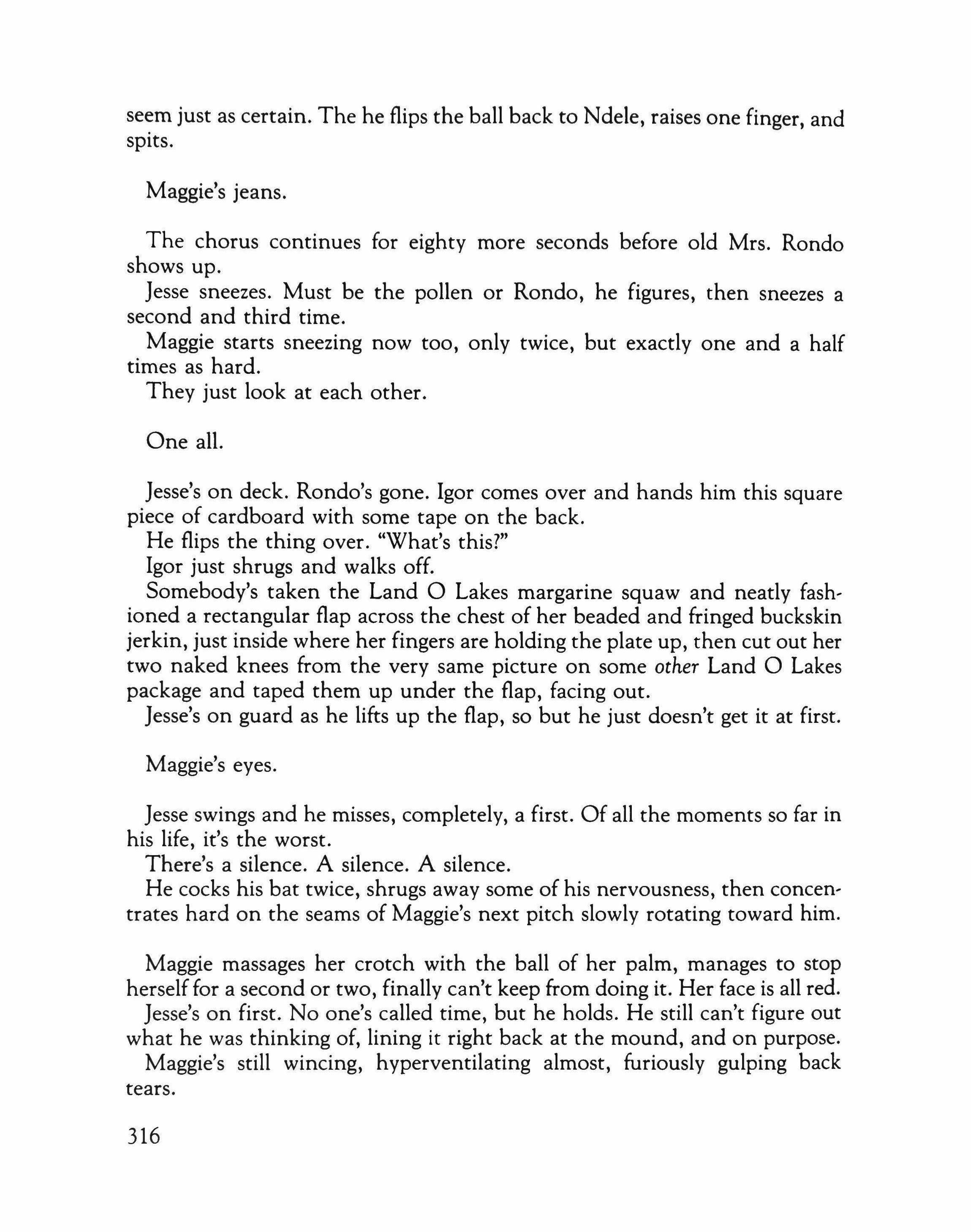
seem just as certain. The he flips the ball back to Ndele, raises one finger, and spits.
Maggie's jeans.
The chorus continues for eighty more seconds before old Mrs. Rondo shows up.
Jesse sneezes. Must be the pollen or Rondo, he figures, then sneezes a second and third time.
Maggie starts sneezing now too, only twice, but exactly one and a half times as hard.
They just look at each other.
One all.
Jesse's on deck. Rondo's gone. Igor comes over and hands him this square piece of cardboard with some tape on the back.
He flips the thing over. "What's this?"
Igor just shrugs and walks off.
Somebody's taken the Land 0 Lakes margarine squaw and neatly fashioned a rectangular flap across the chest of her beaded and fringed buckskin jerkin, just inside where her fingers are holding the plate up, then cut out her two naked knees from the very same picture on some other Land 0 Lakes package and taped them up under the flap, facing out.
Jesse's on guard as he lifts up the flap, so but he just doesn't get it at first.
Maggie's eyes.
Jesse swings and he misses, completely, a first. Of all the moments so far in his life, it's the worst.
There's a silence. A silence. A silence.
He cocks his bat twice, shrugs away some of his nervousness, then concentrates hard on the seams of Maggie's next pitch slowly rotating toward him.
Maggie massages her crotch with the ball of her palm, manages to stop herself for a second or two, finally can't keep from doing it. Her face is all red. Jesse's on first. No one's called time, but he holds. He still can't figure out what he was thinking of, lining it right back at the mound, and on purpose.
Maggie's still wincing, hyperventilating almost, furiously gulping back tears.
"Y OK?" ou
There's laughter, then silence. "Hey Maggie?"
Maggie licks off the small beads of sweat that have formed between her chapped upper lip and her nose. She's O.K.
Though she still looks kind of pale, Jesse thinks. But he's glad. He'd been sort of afraid that everybody'd start going critical on him for what had just happened, even though it was obviously her job to get out of the way or at least get her glove up or something.
But still.
He catches her grabbing a glance now his way, but it's too quick to read her expression.
I mean, what an incredible dummy.
As she gets set to pitch to Ndele, Jesse just stares at her long tan left arm angling up between her shot cowhide glove with the puffy Ms. Pac-Man stickers all over it and the loose light-blue sleeve of her official Bananarama "Over, Under, Sideways, Down" Tshirt.
He makes believe, nothing.
Her skin.
He pretends, just forget it.
The pitch is a ball. The ball gets tossed back. Her tendons tense up when she catches it.
And it's right around now that it starts to come clean to him that
He just loves her.
The ball game is over. The bell's rung. Duende. Everyone's headed back toward the school. Maggie too.
Jesse figures he just might try maybe walking her at least partway to class, even though he's sworn to himself about a googolplex number of times not ever to try such a thing.
Yeah but still.
After weighing the options for seventeen seconds he starts loping in Mag, gie's direction, cursing himself, keeping his head down, hollering out as nonchalantly as possible for her to wait up.
This is different.
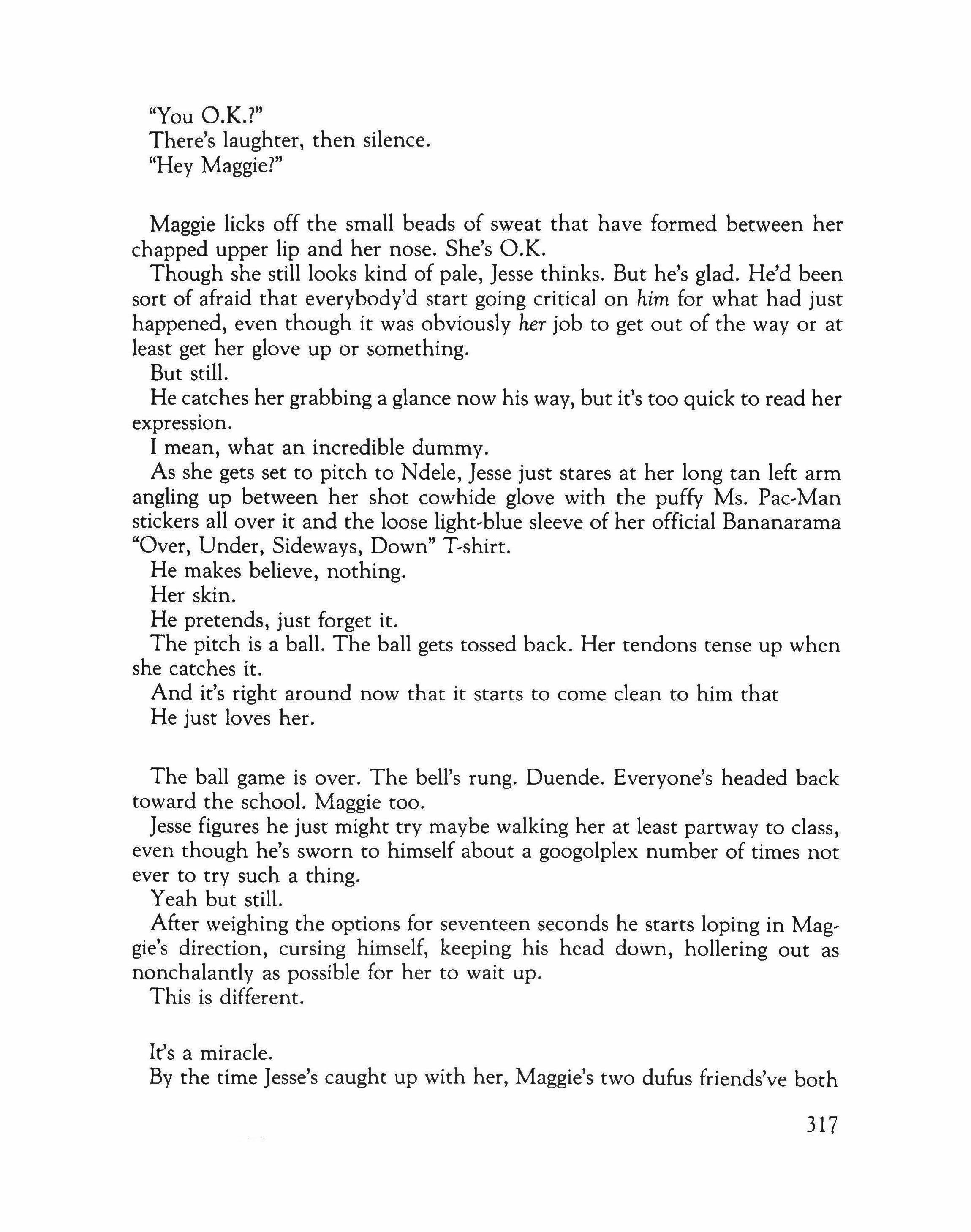
It's a miracle.
By the time Jesse's caught up with her, Maggie's two dufus friends've both

booked. So. They're alone, more or less. The one problem left's that there isn't a single thing he can think of to say to her now. Not a thing.
Maggie, for her part, wants to walk right up to Jesse and give him a great big kiss, Mmwah. (There's this perfume commercial? She sees it all the time on the tube, where the girl actually does such a thing.) But she can't, so she won't.
So she doesn't.
"Good game." "Yeah."
Silence. Dumb silence. It kills them.
"Where you goin'?" says Jesse. "Class I guess. Nowhere. Where you goin'?" "Class?" "Yeah."
"You got a class now, you mean?"
"I guess so. Don't you?"
More silence. "Hey lissen."
Maggie and Jesse are nervous. They're already late as it is. They stop in the hallway just around the corner from Maggie's next class, fiddle with each other's fingers, and kiss. Killerdiller. Their tongues even touch for a second and both of them taste something strange, a quickening flavor that draws them against one another, makes them tilt sideways and back.
That was awesome, thinks Jesse, still holding onto her fingers. I mean, that was really incredible.
"I gotta go in now," says Maggie, grinning a little. "Like I really do have to go in now."
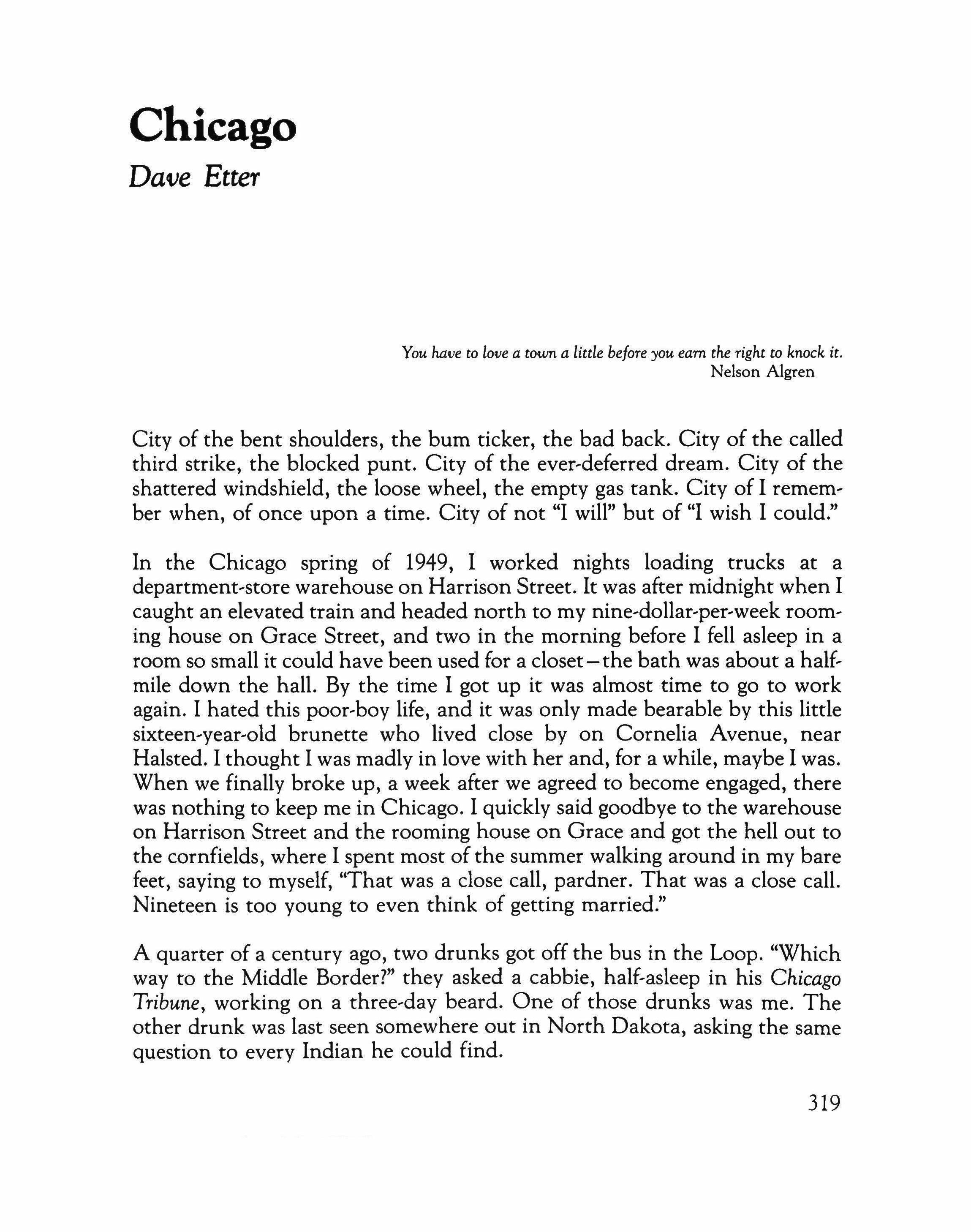
You have to love a town a little before you earn the right to knock it.
City of the bent shoulders, the bum ticker, the bad back. City of the called third strike, the blocked punt. City of the ever-deferred dream. City of the shattered windshield, the loose wheel, the empty gas tank. City of I remem' ber when, of once upon a time. City of not "I will" but of "I wish I could."
In the Chicago spring of 1949, I worked nights loading trucks at a department-store warehouse on Harrison Street. It was after midnight when I caught an elevated train and headed north to my nine-dollar-per-week room' ing house on Grace Street, and two in the morning before I fell asleep in a room so small it could have been used for a closet-the bath was about a half, mile down the hall. By the time I got up it was almost time to go to work again. I hated this poor-boy life, and it was only made bearable by this little sixteen-year-old brunette who lived close by on Cornelia Avenue, near Halsted. I thought I was madly in love with her and, for a while, maybe I was. When we finally broke up, a week after we agreed to become engaged, there was nothing to keep me in Chicago. I quickly said goodbye to the warehouse on Harrison Street and the rooming house on Grace and got the hell out to the cornfields, where I spent most of the summer walking around in my bare feet, saying to myself, "That was a close call, pardner. That was a close call. Nineteen is too young to even think of getting married."
A quarter of a century ago, two drunks got off the bus in the Loop. "Which way to the Middle Border?" they asked a cabbie, half-asleep in his Chicago Tribune, working on a three-day beard. One of those drunks was me. The other drunk was last seen somewhere out in North Dakota, asking the same question to every Indian he could find.
Nelson Algreninformation on

lot
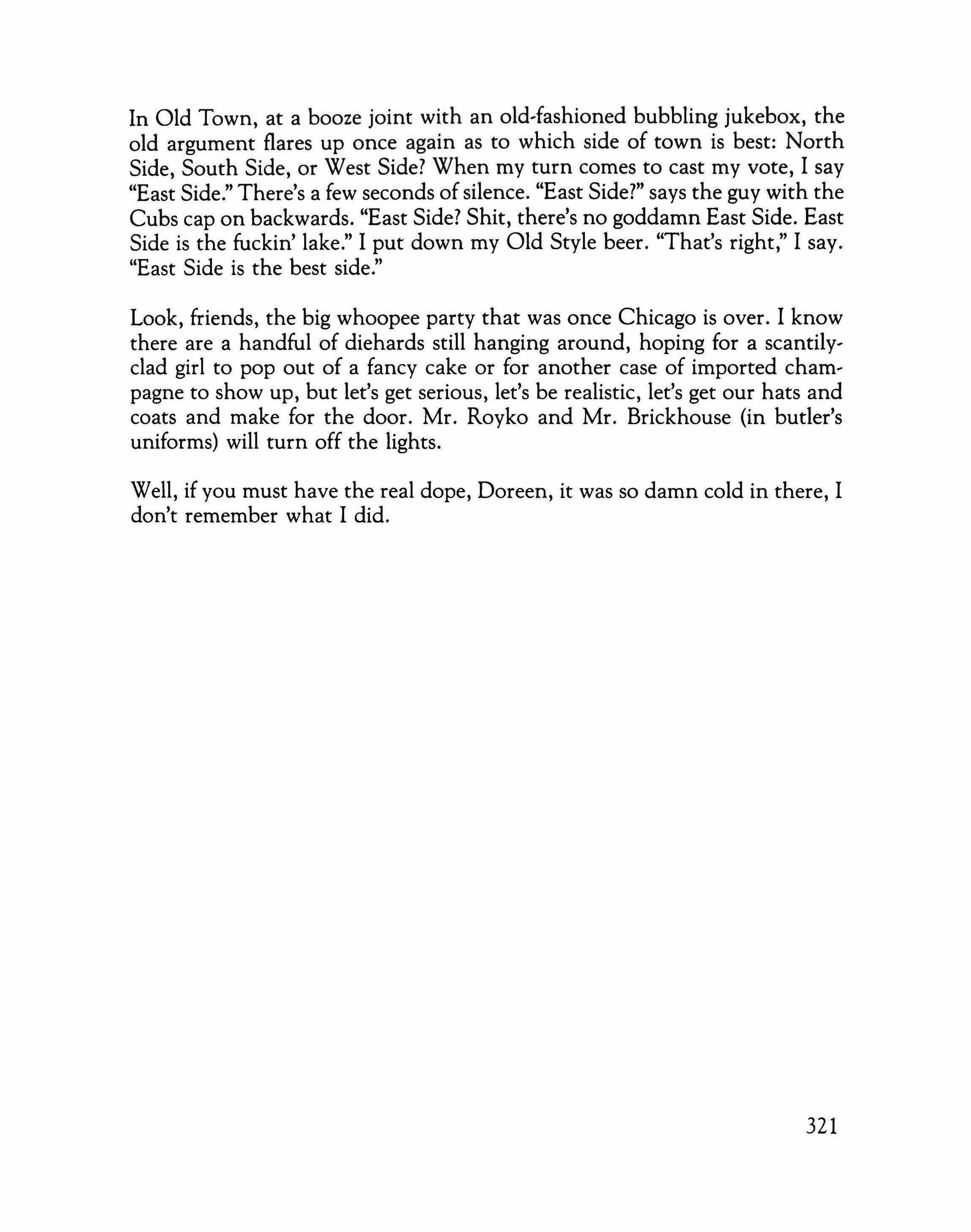
In Old Town, at a booze joint with an old-fashioned bubbling jukebox, the old argument flares up once again as to which side of town is best: North Side, South Side, or West Side? When my turn comes to cast my vote, I say "East Side." There's a few seconds ofsilence. "East Side?" says the guy with the Cubs cap on backwards. "East Side? Shit, there's no goddamn East Side. East Side is the fuckin' lake." I put down my Old Style beer. "That's right," I say. "East Side is the best side."
Look, friends, the big whoopee party that was once Chicago is over. I know there are a handful of diehards still hanging around, hoping for a scantilyclad girl to pop out of a fancy cake or for another case of imported champagne to show up, but let's get serious, let's be realistic, let's get our hats and coats and make for the door. Mr. Royko and Mr. Brickhouse (in butler's uniforms) will turn off the lights.
Well, if you must have the real dope, Doreen, it was so damn cold in there, I don't remember what I did.
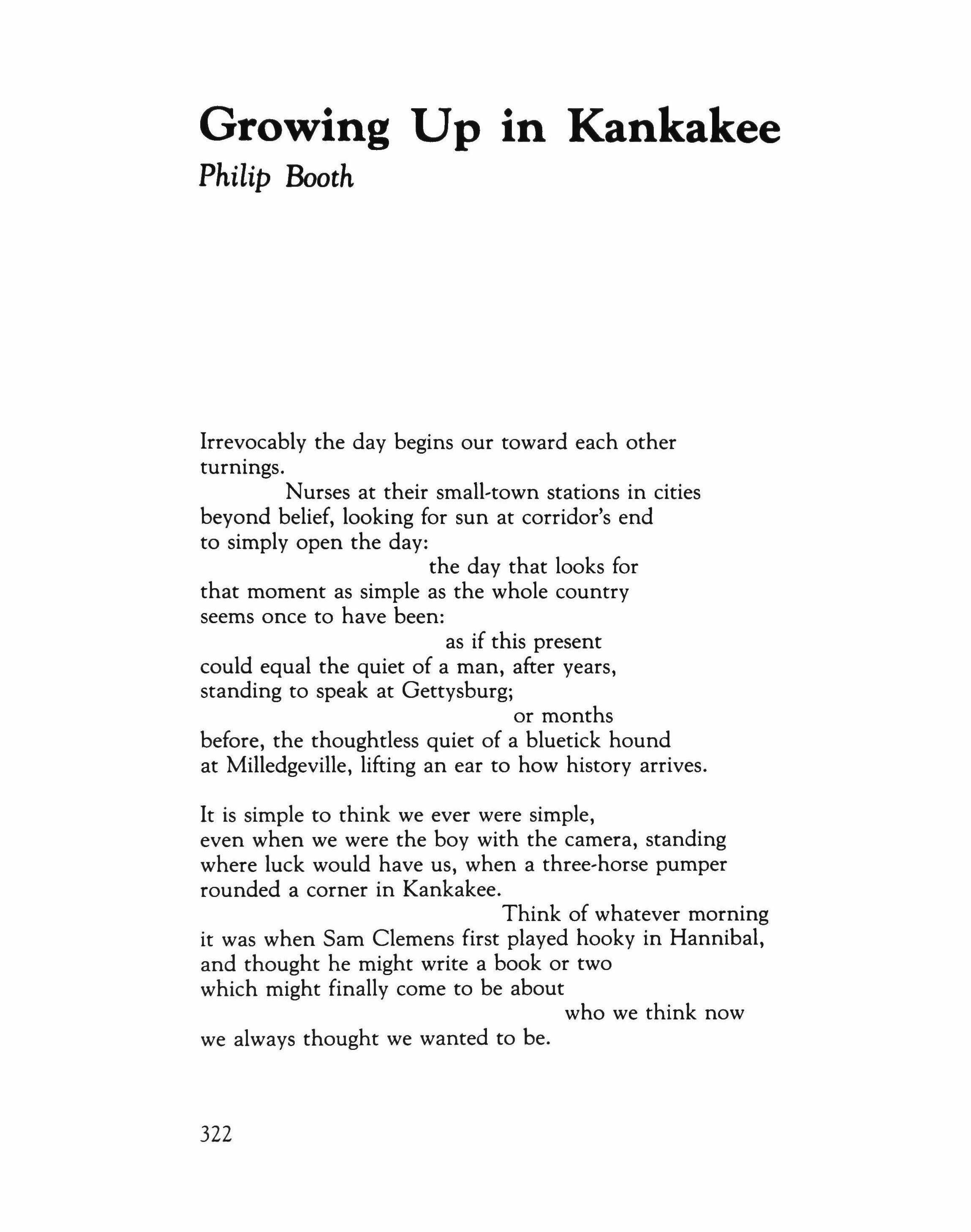
Irrevocably the day begins our toward each other turnings.
Nurses at their small-town stations in cities beyond belief, looking for sun at corridor's end to simply open the day: the day that looks for that moment as simple as the whole country seems once to have been:
as if this present could equal the quiet of a man, after years, standing to speak at Gettysburg; or months before, the thoughtless quiet of a bluetick hound at Milledgeville, lifting an ear to how history arrives.
It is simple to think we ever were simple, even when we were the boy with the camera, standing where luck would have us, when a three,horse pumper rounded a corner in Kankakee.
Think of whatever morning it was when Sam Clemens first played hooky in Hannibal, and thought he might write a book or two which might finally come to be about who we think now we always thought we wanted to be.
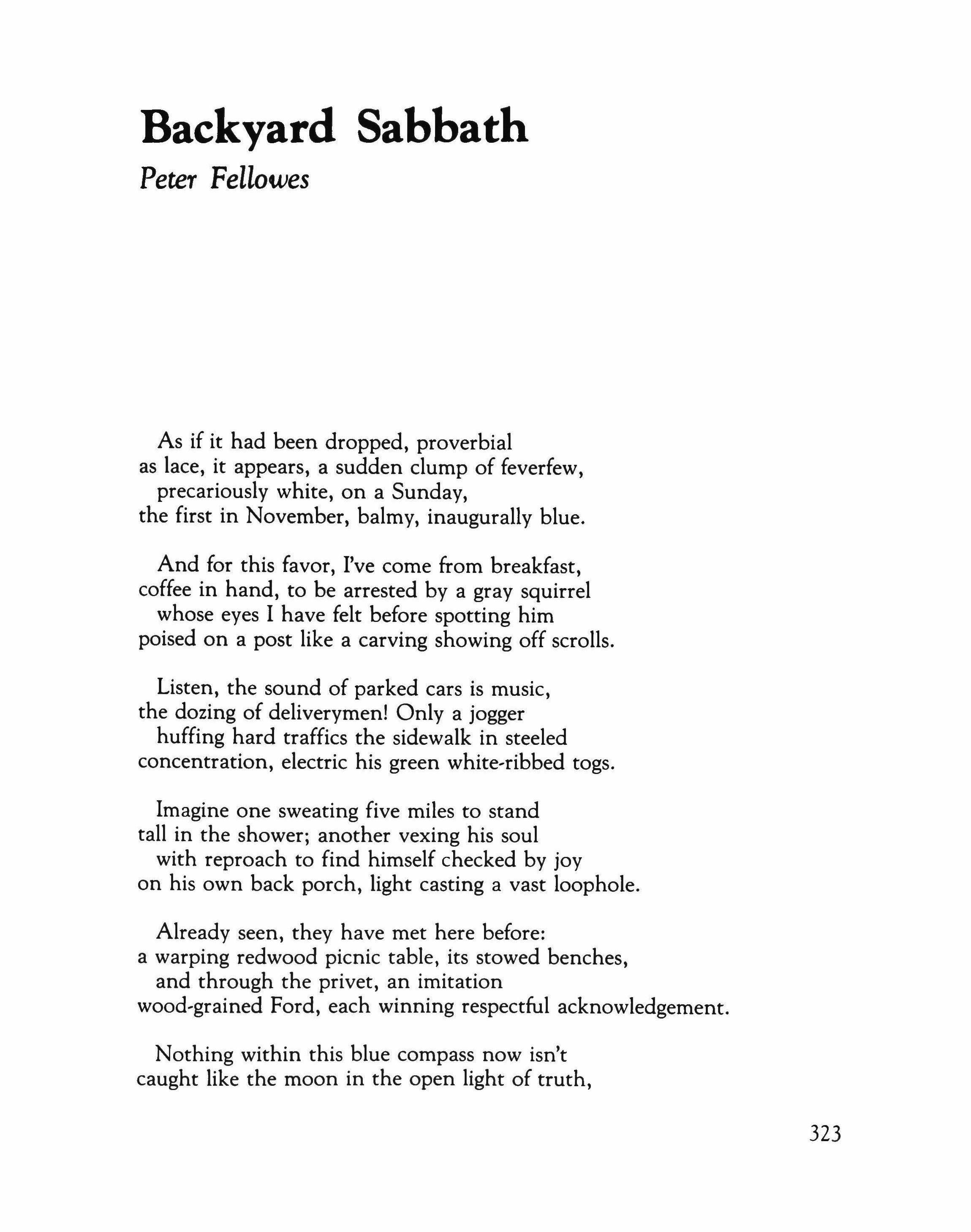
As if it had been dropped, proverbial as lace, it appears, a sudden clump of feverfew, precariously white, on a Sunday, the first in November, balmy, inaugurally blue.
And for this favor, I've come from breakfast, coffee in hand, to be arrested by a gray squirrel whose eyes I have felt before spotting him poised on a post like a carving showing off scrolls.
Listen, the sound of parked cars is music, the dozing of deliverymen! Only a jogger huffing hard traffics the sidewalk in steeled concentration, electric his green white-ribbed togs.
Imagine one sweating five miles to stand tall in the shower; another vexing his soul with reproach to find himself checked by joy on his own back porch, light casting a vast loophole.
Already seen, they have met here before: a warping redwood picnic table, its stowed benches, and through the privet, an imitation wood-grained Ford, each winning respectful acknowledgement.
Nothing within this blue compass now isn't caught like the moon in the open light of truth,

the smudged features yielding, overexposed, to blue, the blinding needle point approaching noon.
No one but isn't recalled to himself as though summoned to the phone, suddenly to know all that's required is he own up today with something like hope in the question, hello.
Even the newsagent standing his corner, his parka unzipped, his fingers woven with bills, feels hope crowd his heart, eyeing church folk, and over the headlines he peddles knows it prevails.
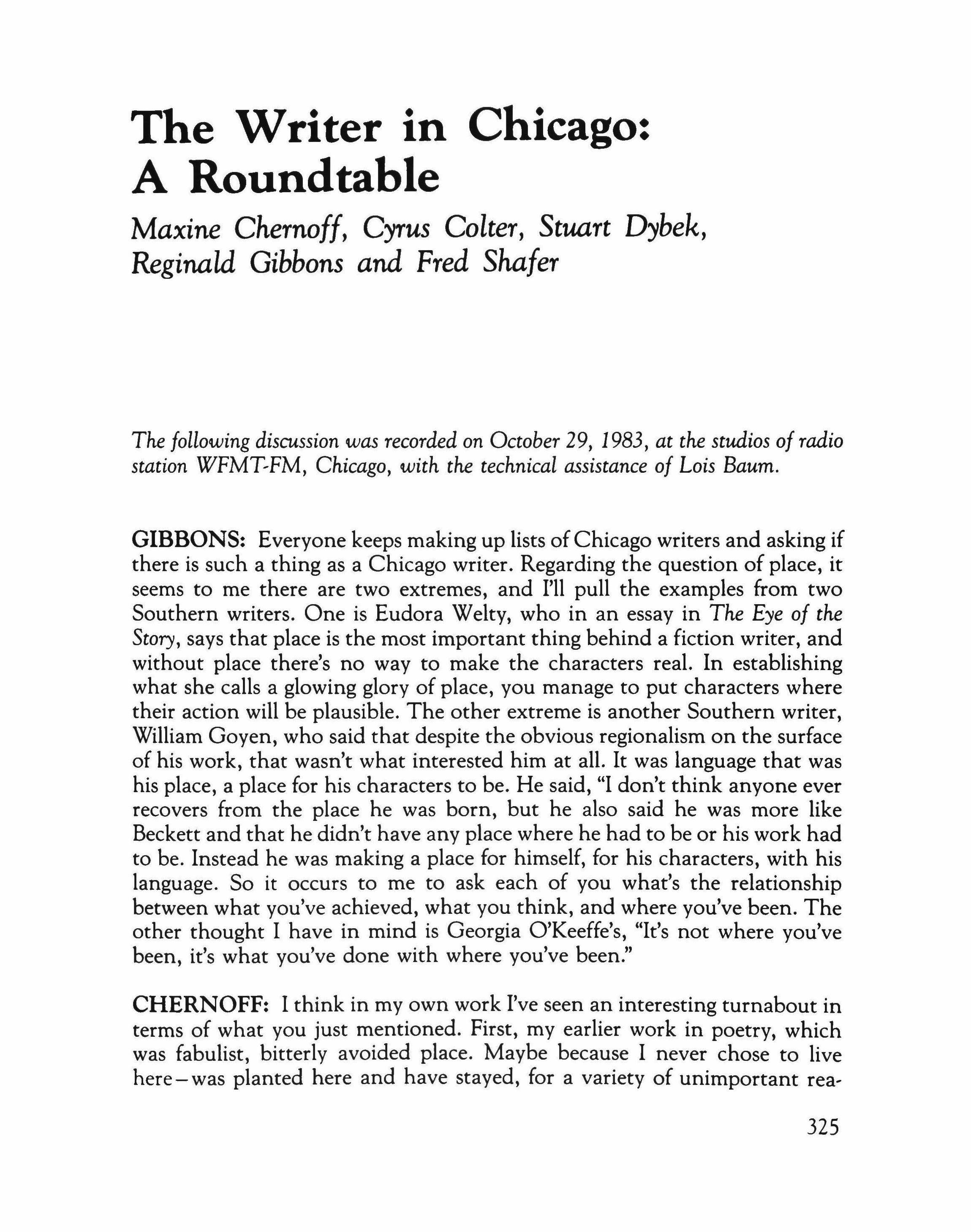
The following discussion was recorded on October 29, 1983, at the studios of radio station WFMT-FM, Chicago, with the technical assistance of Lois Baum.
GIBBONS: Everyone keeps making up lists ofChicago writers and asking if there is such a thing as a Chicago writer. Regarding the question of place, it seems to me there are two extremes, and I'll pull the examples from two Southern writers. One is Eudora Welty, who in an essay in The Eye of the Story, says that place is the most important thing behind a fiction writer, and without place there's no way to make the characters real. In establishing what she calls a glowing glory of place, you manage to put characters where their action will be plausible. The other extreme is another Southern writer, William Goyen, who said that despite the obvious regionalism on the surface of his work, that wasn't what interested him at all. It was language that was his place, a place for his characters to be. He said, "I don't think anyone ever recovers from the place he was born, but he also said he was more like Beckett and that he didn't have any place where he had to be or his work had to be. Instead he was making a place for himself, for his characters, with his language. So it occurs to me to ask each of you what's the relationship between what you've achieved, what you think, and where you've been. The other thought I have in mind is Georgia O'Keeffe's, "It's not where you've been, it's what you've done with where you've been."
CHERNOFF: I think in my own work I've seen an interesting turnabout in terms of what you just mentioned. First, my earlier work in poetry, which was fabulist, bitterly avoided place. Maybe because I never chose to live here - was planted here and have stayed, for a variety of unimportant rea-
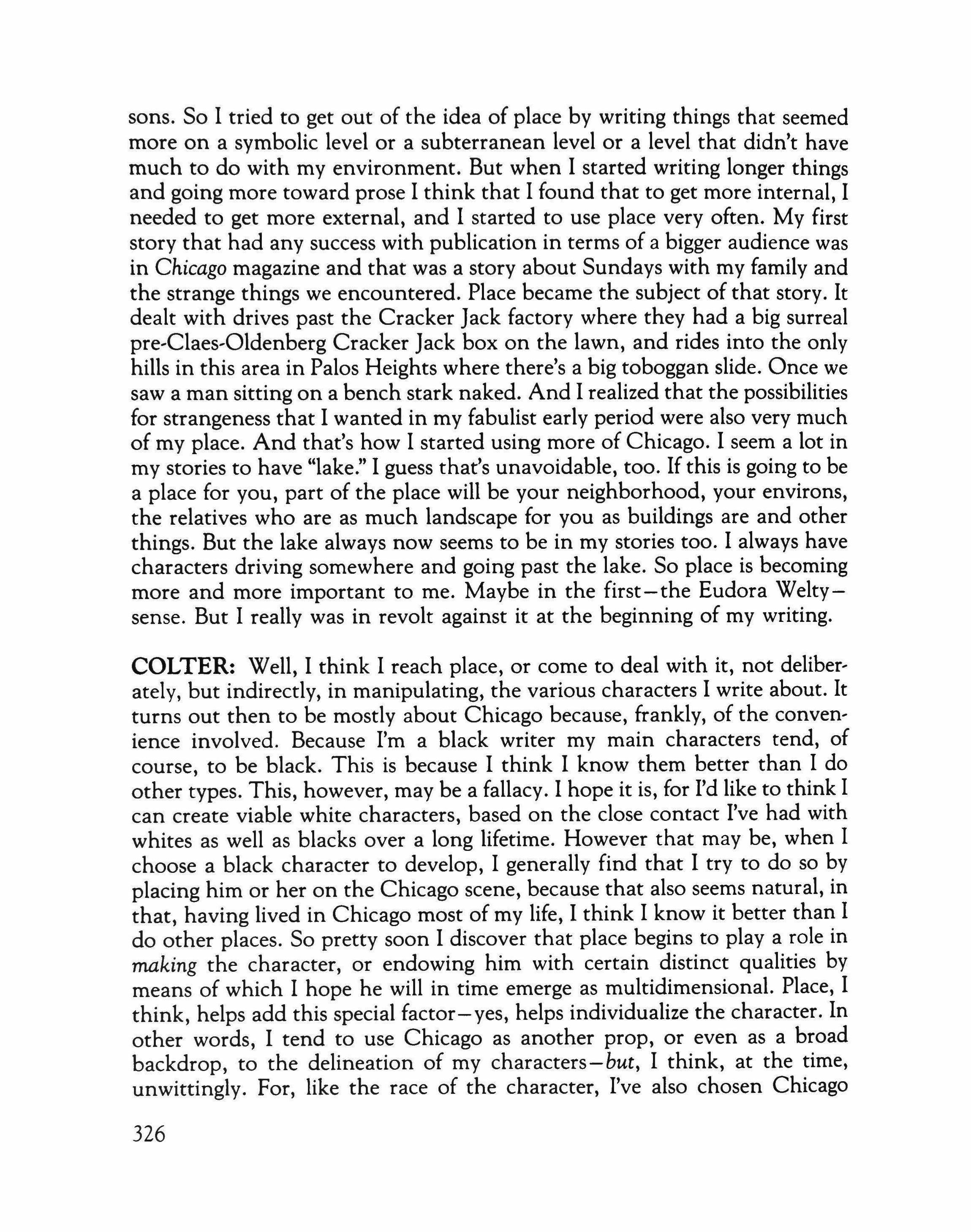
sons. So I tried to get out of the idea of place by writing things that seemed more on a symbolic level or a subterranean level or a level that didn't have much to do with my environment. But when I started writing longer things and going more toward prose I think that I found that to get more internal, I needed to get more external, and I started to use place very often. My first story that had any success with publication in terms of a bigger audience was in Chicago magazine and that was a story about Sundays with my family and the strange things we encountered. Place became the subject of that story. It dealt with drives past the Cracker Jack factory where they had a big surreal pre-Claes-Oldenberg Cracker Jack box on the lawn, and rides into the only hills in this area in Palos Heights where there's a big toboggan slide. Once we saw a man sitting on a bench stark naked. And I realized that the possibilities for strangeness that I wanted in my fabulist early period were also very much of my place. And that's how I started using more of Chicago. I seem a lot in my stories to have "lake." I guess that's unavoidable, too. If this is going to be a place for you, part of the place will be your neighborhood, your environs, the relatives who are as much landscape for you as buildings are and other things. But the lake always now seems to be in my stories too. I always have characters driving somewhere and going past the lake. So place is becoming more and more important to me. Maybe in the first-the Eudora Weltysense. But I really was in revolt against it at the beginning of my writing.
COLTER: Well, I think I reach place, or come to deal with it, not deliberately, but indirectly, in manipulating, the various characters I write about. It turns out then to be mostly about Chicago because, frankly, of the convenience involved. Because I'm a black writer my main characters tend, of course, to be black. This is because I think I know them better than I do other types. This, however, may be a fallacy. I hope it is, for I'd like to think I can create viable white characters, based on the close contact I've had with whites as well as blacks over a long lifetime. However that may be, when I choose a black character to develop, I generally find that I try to do so by placing him or her on the Chicago scene, because that also seems natural, in that, having lived in Chicago most of my life, I think I know it better than I do other places. So pretty soon I discover that place begins to playa role in making the character, or endowing him with certain distinct qualities by means of which I hope he will in time emerge as multidimensional. Place, I think, helps add this special factor-yes, helps individualize the character. In other words, I tend to use Chicago as another prop, or even as a broad backdrop, to the delineation of my characters-but, I think, at the time, unwittingly. For, like the race of the character, I've also chosen Chicago

because it was natural and convenient-because I've convinced my self, rightly or not, that they are more familiar to me. But then, for me, something else happens. I become determined that my black Chicago characters shall not restrict me. Restrict me in what? In portraying the human condition. I therefore do, I think, what most black writers have so far pretty much not chosen to do - I write about all kinds ofblacks. From the low to the high and back again. There is a great gamut here, a tremendously wide rangecontrary to what many people, including apparently some black writers, think. So while I write perhaps predominantly of the black underclass-for that's where much of heartbreak and anguish is to be found - I also explore, with sympathy, I hope, the black middle class, and the intellectuals, even the burgeoning black upper class. The latter is certainly seminal ground, when you consider the high drama involved in their struggle to get where they've gotten. But almost all ofthis has been about blacks-of one kind or anotherliving out their lives in Chicago. I repeat, however, that both components were chosen by me purely out of the very natural convenience involved. Does this then make me (I'm demonstrably black) a Chicago writer? Maybe circuitously, but I think it does. I don't know, but I do know that the Illinois Central brought blacks up from the South, from specific places, Louisiana, Mississippi, Alabama, Tennessee, and of course we know that Chicago is supposed to be the most segregated large city in the country. Maybe that works two ways. Maybe this is one sense in which there may be some benefits from that because we do have a discrete body or population that's physically situated in a certain section of Chicago. Now, whether that gives it some homogeneity, I don't know. I happen to see my characters, for the most part, in this area. That doesn't mean they're all slum dwellers or that they're all project dwellers, but they're professional people, middle-class people, church people, of various kinds, in various economic strata. But they happen to be Chicagoans, and I think there is something unique in the fact that they do live in Chicago.
GIBBONS: Can I ask you to go a little further with that? What would have been different then if you had gone off to practice law in St. Louis or Buffalo? I mean you said distinctly Chicagoans, but what is that? Is it just the accident of this place, or is there a value that you've been drawing out of them that you wouldn't have gotten in another community or town?
COLTER: That's a good question. I'm not sure that my hypothesis holds up here, but for instance you had the stockyards here. And I think you will recall that during the race riots here in 1919 there were a great number of
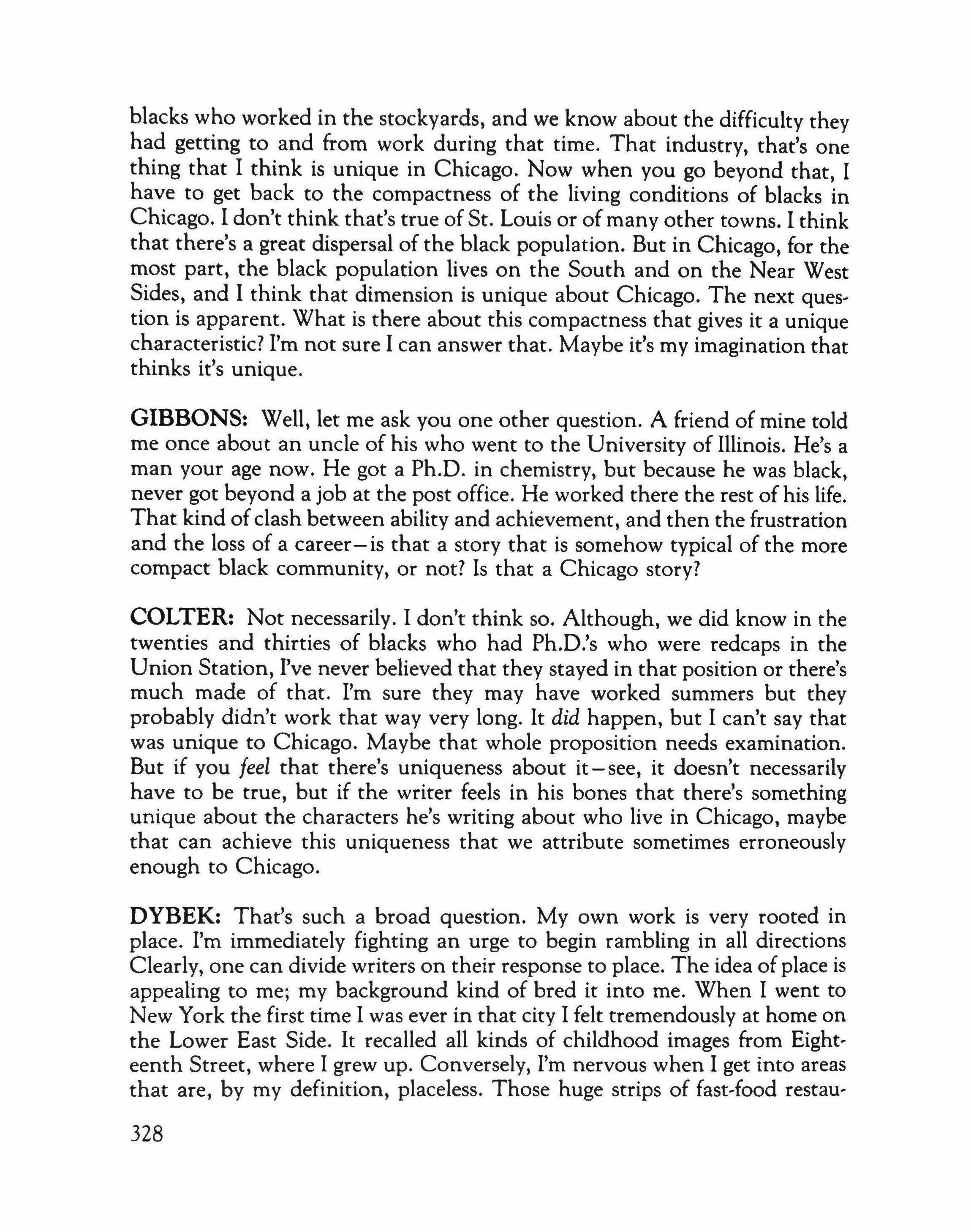
blacks who worked in the stockyards, and we know about the difficulty they had getting to and from work during that time. That industry, that's one thing that I think is unique in Chicago. Now when you go beyond that, I have to get back to the compactness of the living conditions of blacks in Chicago. I don't think that's true of St. Louis or of many other towns. I think that there's a great dispersal of the black population. But in Chicago, for the most part, the black population lives on the South and on the Near West Sides, and I think that dimension is unique about Chicago. The next question is apparent. What is there about this compactness that gives it a unique characteristic? I'm not sure I can answer that. Maybe it's my imagination that thinks it's unique.
GIBBONS: Well, let me ask you one other question. A friend of mine told me once about an uncle of his who went to the University of Illinois. He's a man your age now. He got a Ph.D. in chemistry, but because he was black, never got beyond a job at the post office. He worked there the rest of his life. That kind ofclash between ability and achievement, and then the frustration and the loss of a career- is that a story that is somehow typical of the more compact black community, or not? Is that a Chicago story?
COLTER: Not necessarily. I don't think so. Although, we did know in the twenties and thirties of blacks who had Ph.D.'s who were redcaps in the Union Station, I've never believed that they stayed in that position or there's much made of that. I'm sure they may have worked summers but they probably didn't work that way very long. It did happen, but I can't say that was unique to Chicago. Maybe that whole proposition needs examination. But if you feel that there's uniqueness about itsee, it doesn't necessarily have to be true, but if the writer feels in his bones that there's something unique about the characters he's writing about who live in Chicago, maybe that can achieve this uniqueness that we attribute sometimes erroneously enough to Chicago.
DYBEK: That's such a broad question. My own work is very rooted in place. I'm immediately fighting an urge to begin rambling in all directions Clearly, one can divide writers on their response to place. The idea of place is appealing to me; my background kind of bred it into me. When I went to New York the first time I was ever in that city I felt tremendously at home on the Lower East Side. It recalled all kinds of childhood images from Eight, eenth Street, where I grew up. Conversely, I'm nervous when I get into areas that are, by my definition, placeless. Those huge strips of fast-food restau-

rants and malls that a city seems surrounded by and that certain cities seem to have become. So there's an urge in my work to kind of defend my version of place, consciously or unconsciously.
I deal with the fantastic and realistic both, and sometimes try to make hybrid stories out of them. I may be writing about the same place in each type of story, but in realism I feel more of a responsibility to record place, and in the fantastic more of an urge to create place through language, if that makes any sense. Chicago is just one of the places that I have in mind while I write. There's a broader midwestern sense of place as well, the kind one finds in Sherwood Anderson that sometimes is very much at odds with the urban phenomenon of Chicago writing.
CHERNOFF: If you did grow up in the city as Stuart and I both did, I think what Cyrus is saying about the ethnic strongholds, neighborhoods, is very much the case not only for a black person, but for everyone. I grew up in a neighborhood that was strongly Russian and Jewish, and many people I knew had exactly the same ethnic background. In high school, I got to brush with other ethnic groups, but until then there had been really no mixing at all ofethnicities. If you come from the city proper and not a suburb, there is a strong sense of neighborhood that's inevitable, simply because our parents either flocked to islands of safety or were forced to move to places like that for various reasons. So I feel the same way. The newer suburbs are frightening in their lack of identity-the non-ethnicity of the mall-overtaking anything else that was once place.
SHAFER: Does this influence, too, one's decisions and assumptions about oneself as a writer? I'm thinking about work that goes back to earlier models, tracing ethnic sources to their origins, finding precursors of the people who have settled here. Does that happen naturally for one growing up in the city, that you want to find your ethnic roots not only as a resident of the neighborhood, but as a writer? In some of his stories, Stuart seems to be tapping into fables and myths and stories that seem to have been handed down into the communities where he grew up. Is that so?
DYBEK: It's so now. What happened, and I'll tell it as briefly as I can, but it needs a little bit of story,like quality to it, is that like everybody who's beginning to write, you have influences and yet you're also well aware that you'd like to write in your own voice. So I was puzzling around that. A lot of the writers I liked were realists and much of my reading had been done along those lines. I've already mentioned Sherwood Anderson, who greatly
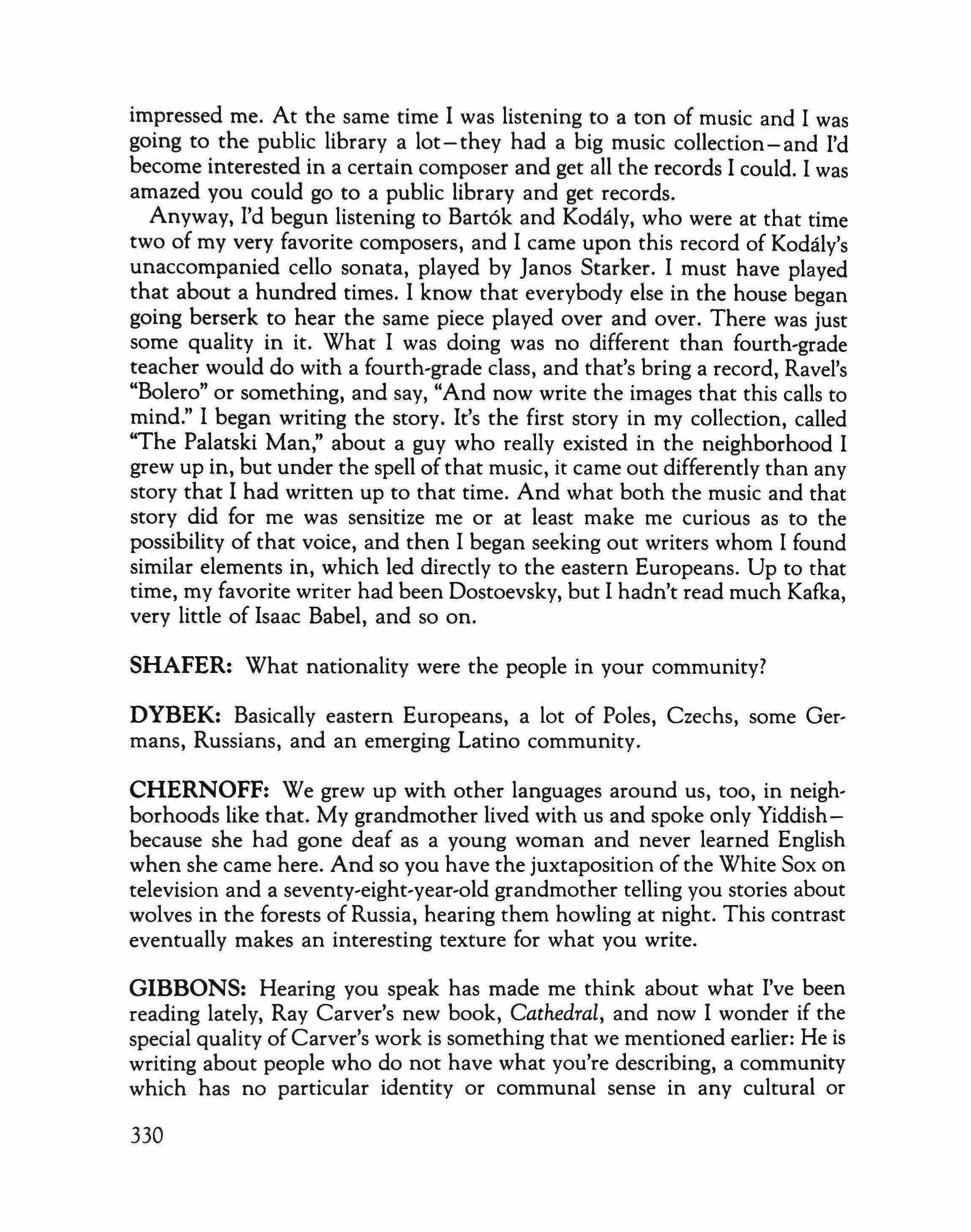
impressed me. At the same time I was listening to a ton of music and I was going to the public library a lot-they had a big music collection-and I'd become interested in a certain composer and get all the records I could. I was amazed you could go to a public library and get records. Anyway, I'd begun listening to Bartok and Kodaly, who were at that time two of my very favorite composers, and I came upon this record of Kodalv's unaccompanied cello sonata, played by Janos Starker. I must have played that about a hundred times. I know that everybody else in the house began going berserk to hear the same piece played over and over. There was just some quality in it. What I was doing was no different than fourth-grade teacher would do with a fourth-grade class, and that's bring a record, Ravel's "Bolero" or something, and say, "And now write the images that this calls to mind." I began writing the story. It's the first story in my collection, called "The Palatski Man:' about a guy who really existed in the neighborhood I grew up in, but under the spell ofthat music, it came out differently than any story that I had written up to that time. And what both the music and that story did for me was sensitize me or at least make me curious as to the possibility of that voice, and then I began seeking out writers whom I found similar elements in, which led directly to the eastern Europeans. Up to that time, my favorite writer had been Dostoevsky, but I hadn't read much Kafka, very little of Isaac Babel, and so on.
SHAFER: What nationality were the people in your community?
DYBEK: Basically eastern Europeans, a lot of Poles, Czechs, some Germans, Russians, and an emerging Latino community.
CHERNOFF: We grew up with other languages around us, too, in neigh, borhoods like that. My grandmother lived with us and spoke only Yiddishbecause she had gone deaf as a young woman and never learned English when she came here. And so you have the juxtaposition of the White Sox on television and a seventy-eight-year-old grandmother telling you stories about wolves in the forests of Russia, hearing them howling at night. This contrast eventually makes an interesting texture for what you write.
GIBBONS: Hearing you speak has made me think about what I've been reading lately, Ray Carver's new book, Cathedral, and now I wonder if the special quality of Carver's work is something that we mentioned earlier: He is writing about people who do not have what you're describing, a community which has no particular identity or communal sense in any cultural or
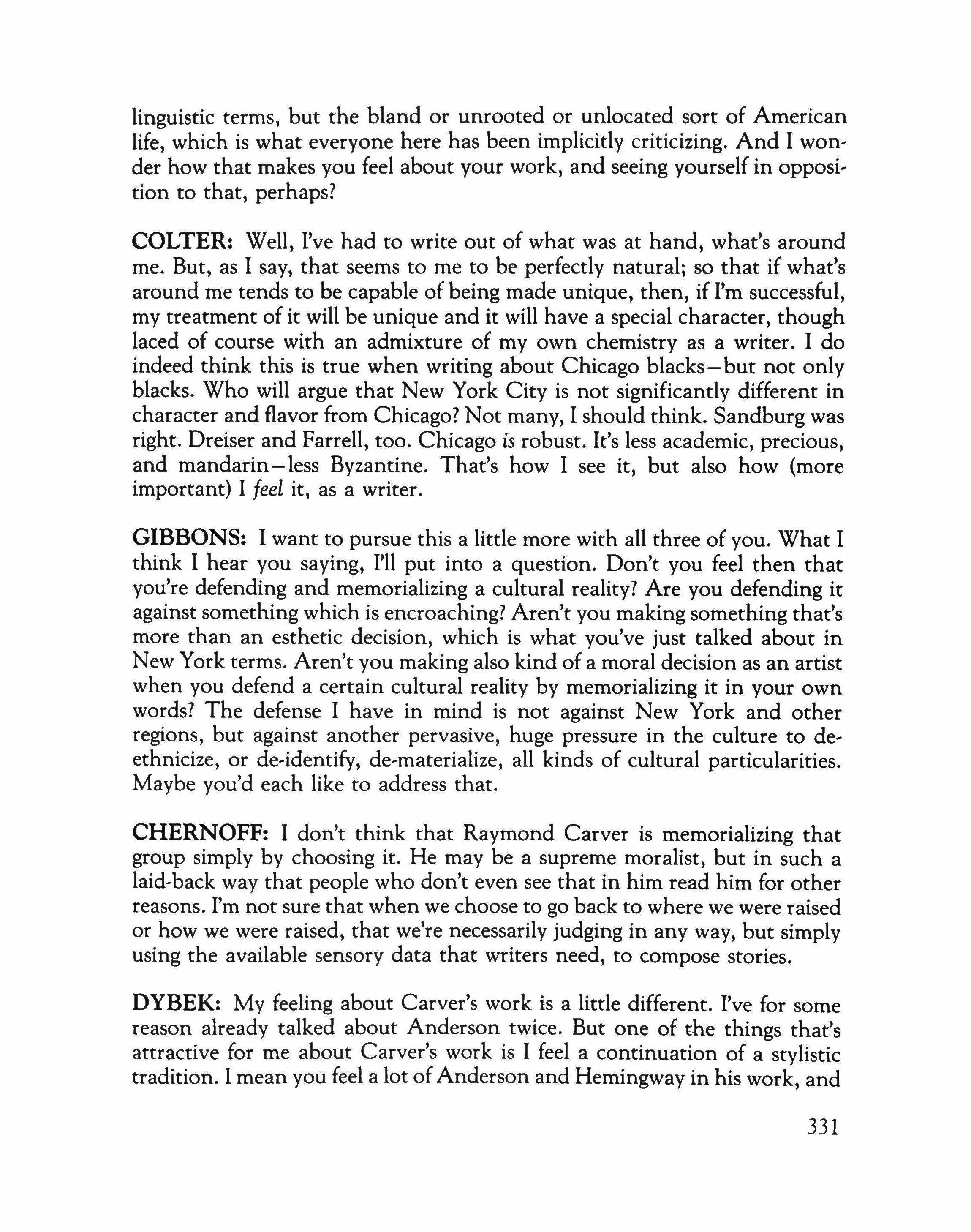
linguistic terms, but the bland or unrooted or unlocated sort of American life, which is what everyone here has been implicitly criticizing. And I won' der how that makes you feel about your work, and seeing yourself in opposition to that, perhaps?
COLTER: Well, I've had to write out of what was at hand, what's around me. But, as I say, that seems to me to be perfectly natural; so that if what's around me tends to be capable of being made unique, then, if I'm successful, my treatment of it will be unique and it will have a special character, though laced of course with an admixture of my own chemistry as a writer. I do indeed think this is true when writing about Chicago blacks-but not only blacks. Who will argue that New York City is not significantly different in character and flavor from Chicago? Not many, I should think. Sandburg was right. Dreiser and Farrell, too. Chicago is robust. It's less academic, precious, and mandarin-less Byzantine. That's how I see it, but also how (more important) I feel it, as a writer.
GIBBONS: I want to pursue this a little more with all three of you. What I think I hear you saying, I'll put into a question. Don't you feel then that you're defending and memorializing a cultural reality? Are you defending it against something which is encroaching? Aren't you making something that's more than an esthetic decision, which is what you've just talked about in New York terms. Aren't you making also kind of a moral decision as an artist when you defend a certain cultural reality by memorializing it in your own words? The defense I have in mind is not against New York and other regions, but against another pervasive, huge pressure in the culture to de' ethnicize, or de-identify, de-materialize, all kinds of cultural particularities. Maybe you'd each like to address that.
CHERNOFF: I don't think that Raymond Carver is memorializing that group simply by choosing it. He may be a supreme moralist, but in such a laid-back way that people who don't even see that in him read him for other reasons. I'm not sure that when we choose to go back to where we were raised or how we were raised, that we're necessarily judging in any way, but simply using the available sensory data that writers need, to compose stories.
DYBEK: My feeling about Carver's work is a little different. I've for some reason already talked about Anderson twice. But one of the things that's attractive for me about Carver's work is I feel a continuation of a stylistic tradition. I mean you feel a lot ofAnderson and Hemingway in his work, and
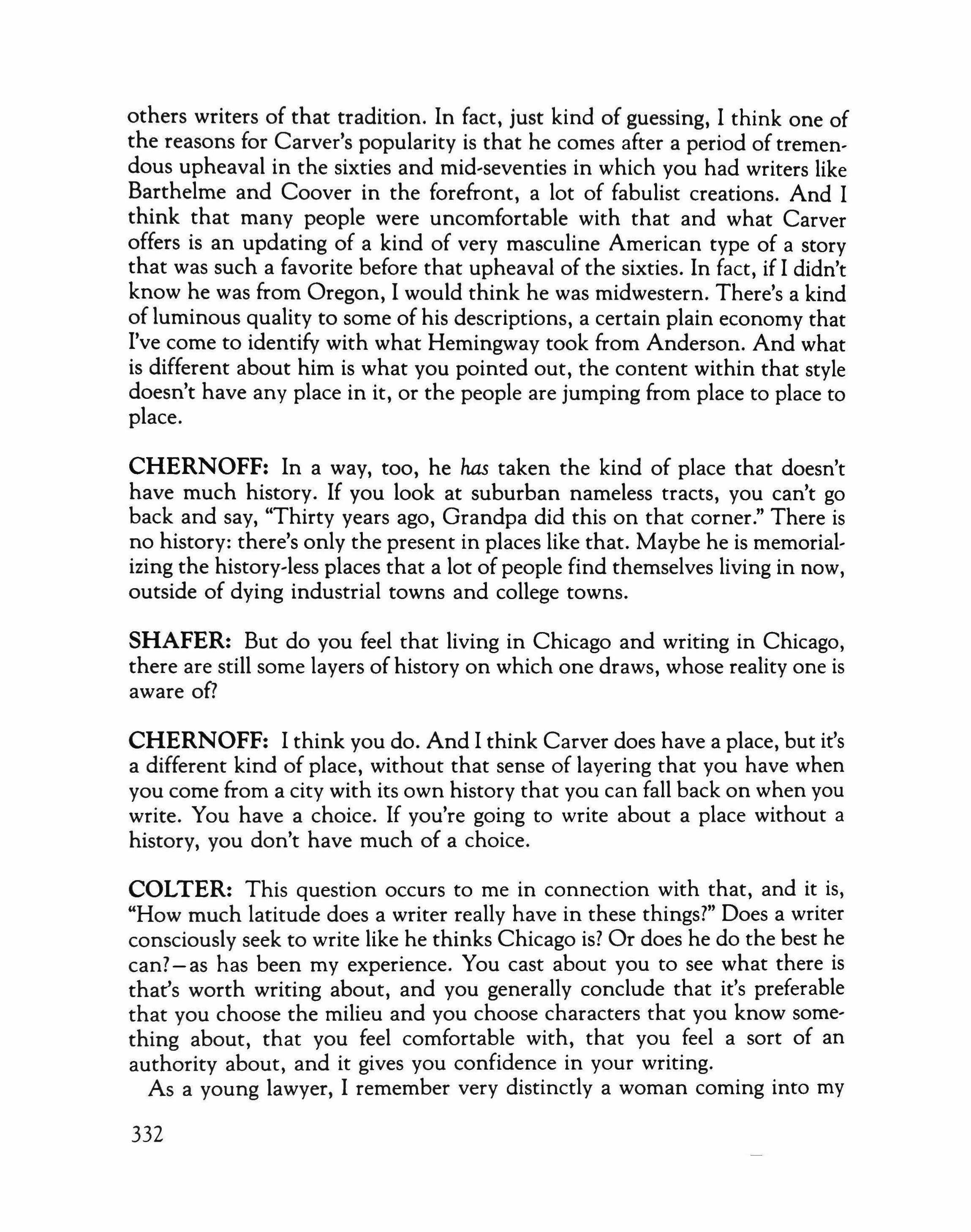
others writers of that tradition. In fact, just kind of guessing, I think one of the reasons for Carver's popularity is that he comes after a period of tremendous upheaval in the sixties and mid-seventies in which you had writers like Barthelme and Coover in the forefront, a lot of fabulist creations. And I think that many people were uncomfortable with that and what Carver offers is an updating of a kind of very masculine American type of a story that was such a favorite before that upheaval of the sixties. In fact, if I didn't know he was from Oregon, I would think he was midwestern. There's a kind of luminous quality to some of his descriptions, a certain plain economy that I've corne to identify with what Hemingway took from Anderson. And what is different about him is what you pointed out, the content within that style doesn't have any place in it, or the people are jumping from place to place to place.
CHERNOFF: In a way, too, he has taken the kind of place that doesn't have much history. If you look at suburban nameless tracts, you can't go back and say, "Thirty years ago, Grandpa did this on that corner." There is no history: there's only the present in places like that. Maybe he is memorializing the historv-less places that a lot of people find themselves living in now, outside of dying industrial towns and college towns.
SHAFER: But do you feel that living in Chicago and writing in Chicago, there are still some layers of history on which one draws, whose reality one is aware of?
CHERNOFF: I think you do. And I think Carver does have a place, but it's a different kind of place, without that sense of layering that you have when you corne from a city with its own history that you can fall back on when you write. You have a choice. If you're going to write about a place without a history, you don't have much of a choice.
COLTER: This question occurs to me in connection with that, and it is, "How much latitude does a writer really have in these things?" Does a writer consciously seek to write like he thinks Chicago is? Or does he do the best he can? - as has been my experience. You cast about you to see what there is that's worth writing about, and you generally conclude that it's preferable that you choose the milieu and you choose characters that you know something about, that you feel comfortable with, that you feel a sort of an authority about, and it gives you confidence in your writing.
As a young lawyer, I remember very distinctly a woman corning into my

office. She was very quiet, and I tried to put her at ease and finally she didn't say anything, and I tried to get her to talk, because time was going by and I had other things to do. And I said, well, what can I do for you? She said, "Lawyer Colter, I wants to get divorceded." And then she told me a story, the like of which I'd never heard. This was before I'd ever thought about writing. And when I did begin writing that was still in my mind and I wrote a story about it, and it was very handy for me to do that, because the genesis of this story had been an incident that I felt very comfortable with and it was about people I was familiar with, and it came rather readily.
SHAFER: Often, in discussions of Chicago writing Nelson Algren's name and James Farrell's name come up. To what extent is someone growing up as a writer in Chicago aware of those names, influenced by them, and perhaps in need of breaking from them?
CHERNOFF: I don't think that either Algren or Farrell would be choices or role models for a woman writer growing up in Chicago. Many of the writers you think of as the Chicago writers are the brawling, barroom kind of writers that might portray a man's point of view. It wouldn't have to be, but would more comfortably be that than a woman's point of view. I'm trying to think of what women writers you have in Chicago as models. You have superb administrators, like Harriet Monroe, who started Poetry magazine. The male tradition seems to me, in my own writing, as distant as what Carl Sandburg did in poetry, say. I would never attempt to do it now or want to follow it.
SHAFER: Can the Algren tradition even be misleading for a male writer who would hew to it?
COLTER: It wouldn't be misleading to me, I don't think, because I tend to want to believe, I tend to believe, that much of what we're talking about is ex post facto, because as writers we do the best we can and we use materials that we feel comfortable with and that we feel we can handle effectively, and we do our work. Then maybe after this someone tends to find some common threads that will enable them to give it a label, and we come out with Chicago writers. I'm not sure about it, but I know that I'm one writer who does not I don't get too influenced by these things. I have to start with things very close to me, things that I can use and that have something almost tactile in their quality that enables me to work effectively. And then what interpretation others want to put on it, that's up to them. But I think I would
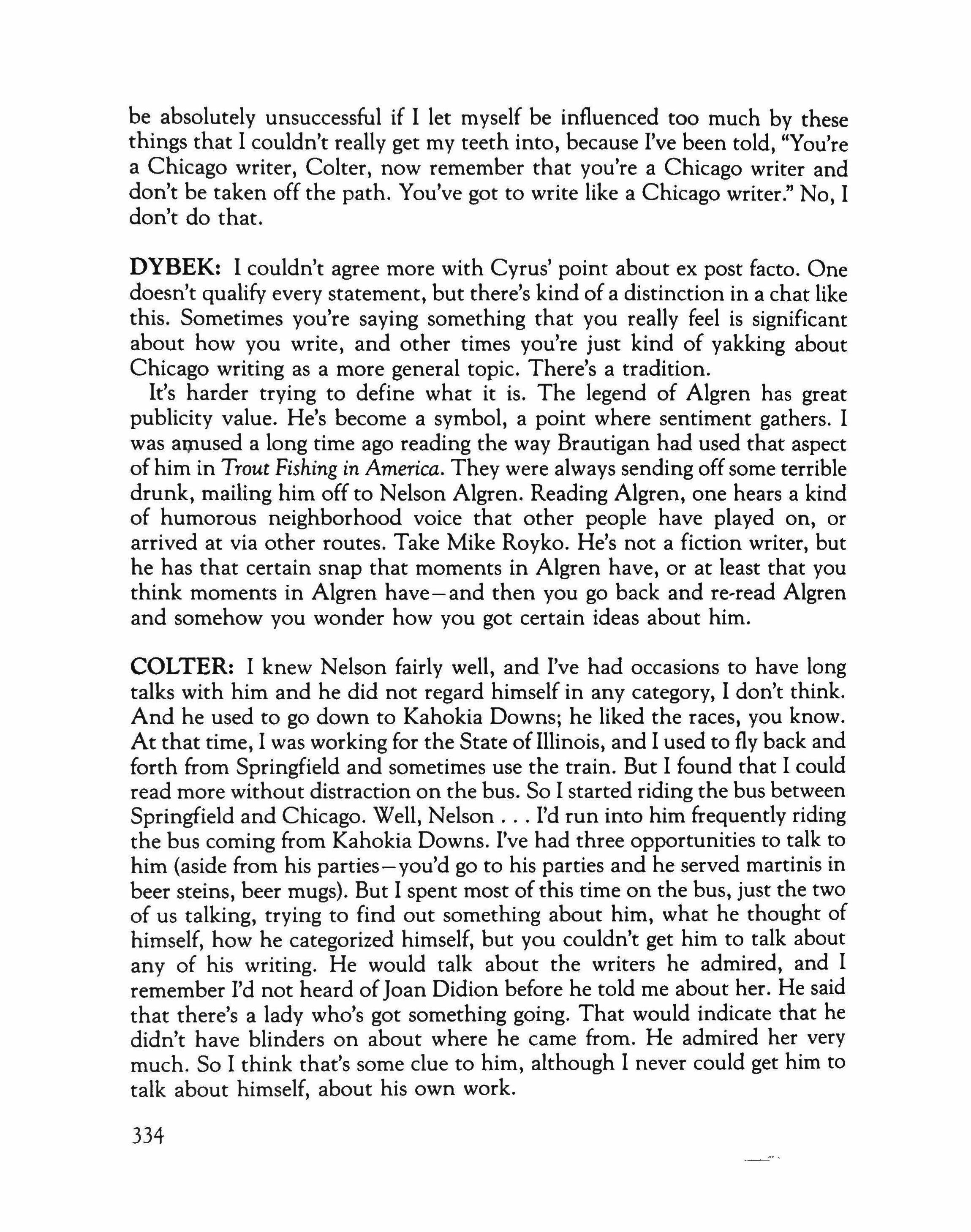
be absolutely unsuccessful if I let myself be influenced too much by these things that I couldn't really get my teeth into, because I've been told, "You're a Chicago writer, Colter, now remember that you're a Chicago writer and don't be taken off the path. You've got to write like a Chicago writer." No, I don't do that.
DYBEK: I couldn't agree more with Cyrus' point about ex post facto. One doesn't qualify every statement, but there's kind of a distinction in a chat like this. Sometimes you're saying something that you really feel is significant about how you write, and other times you're just kind of yakking about Chicago writing as a more general topic. There's a tradition. It's harder trying to define what it is. The legend of Algren has great publicity value. He's become a symbol, a point where sentiment gathers. I was amused a long time ago reading the way Brautigan had used that aspect of him in Trout Fishing in America. They were always sending off some terrible drunk, mailing him off to Nelson Algren. Reading Algren, one hears a kind of humorous neighborhood voice that other people have played on, or arrived at via other routes. Take Mike Rovko. He's not a fiction writer, but he has that certain snap that moments in Algren have, or at least that you think moments in Algren have-and then you go back and re-read Algren and somehow you wonder how you got certain ideas about him.
COLTER: I knew Nelson fairly well, and I've had occasions to have long talks with him and he did not regard himself in any category, I don't think. And he used to go down to Kahokia Downs; he liked the races, you know. At that time, I was working for the State ofIllinois, and I used to fly back and forth from Springfield and sometimes use the train. But I found that I could read more without distraction on the bus. So I started riding the bus between Springfield and Chicago. Well, Nelson I'd run into him frequently riding the bus coming from Kahokia Downs. I've had three opportunities to talk to him (aside from his parties-you'd go to his parties and he served martinis in beer steins, beer mugs). But I spent most of this time on the bus, just the two of us talking, trying to find out something about him, what he thought of himself, how he categorized himself, but you couldn't get him to talk about any of his writing. He would talk about the writers he admired, and I remember I'd not heard ofjoan Didion before he told me about her. He said that there's a lady who's got something going. That would indicate that he didn't have blinders on about where he came from. He admired her very much. So I think that's some clue to him, although I never could get him to talk about himself, about his own work.
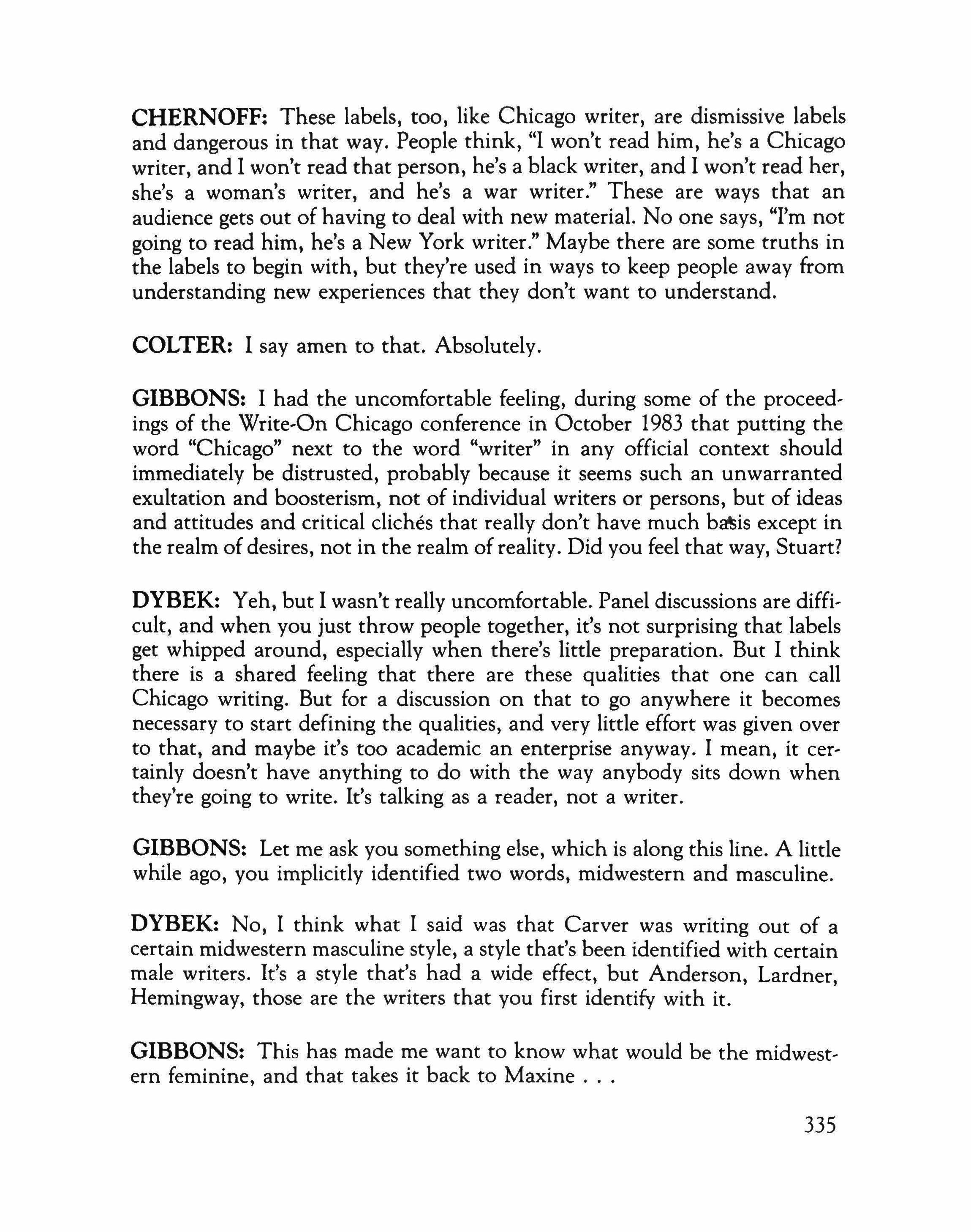
CHERNOFF: These labels, too, like Chicago writer, are dismissive labels and dangerous in that way. People think, "I won't read him, he's a Chicago writer, and I won't read that person, he's a black writer, and I won't read her, she's a woman's writer, and he's a war writer." These are ways that an audience gets out of having to deal with new material. No one says, "I'm not going to read him, he's a New York writer." Maybe there are some truths in the labels to begin with, but they're used in ways to keep people away from understanding new experiences that they don't want to understand.
COLTER: I say amen to that. Absolutely.
GIBBONS: I had the uncomfortable feeling, during some of the proceed, ings of the Write,On Chicago conference in October 1983 that putting the word "Chicago" next to the word "writer" in any official context should immediately be distrusted, probably because it seems such an unwarranted exultation and boosterism, not of individual writers or persons, but of ideas and attitudes and critical cliches that really don't have much b�is except in the realm of desires, not in the realm ofreality. Did you feel that way, Stuart?
DYBEK: Yeh, but I wasn't really uncomfortable. Panel discussions are difficult, and when you just throw people together, it's not surprising that labels get whipped around, especially when there's little preparation. But I think there is a shared feeling that there are these qualities that one can call Chicago writing. But for a discussion on that to go anywhere it becomes necessary to start defining the qualities, and very little effort was given over to that, and maybe it's too academic an enterprise anyway. I mean, it certainly doesn't have anything to do with the way anybody sits down when they're going to write. It's talking as a reader, not a writer.
GIBBONS: Let me ask you something else, which is along this line. A little while ago, you implicitly identified two words, midwestern and masculine.
DYBEK: No, I think what I said was that Carver was writing out of a certain midwestern masculine style, a style that's been identified with certain male writers. It's a style that's had a wide effect, but Anderson, Lardner, Hemingway, those are the writers that you first identify with it.
GIBBONS: This has made me want to know what would be the midwest, ern feminine, and that takes it back to Maxine
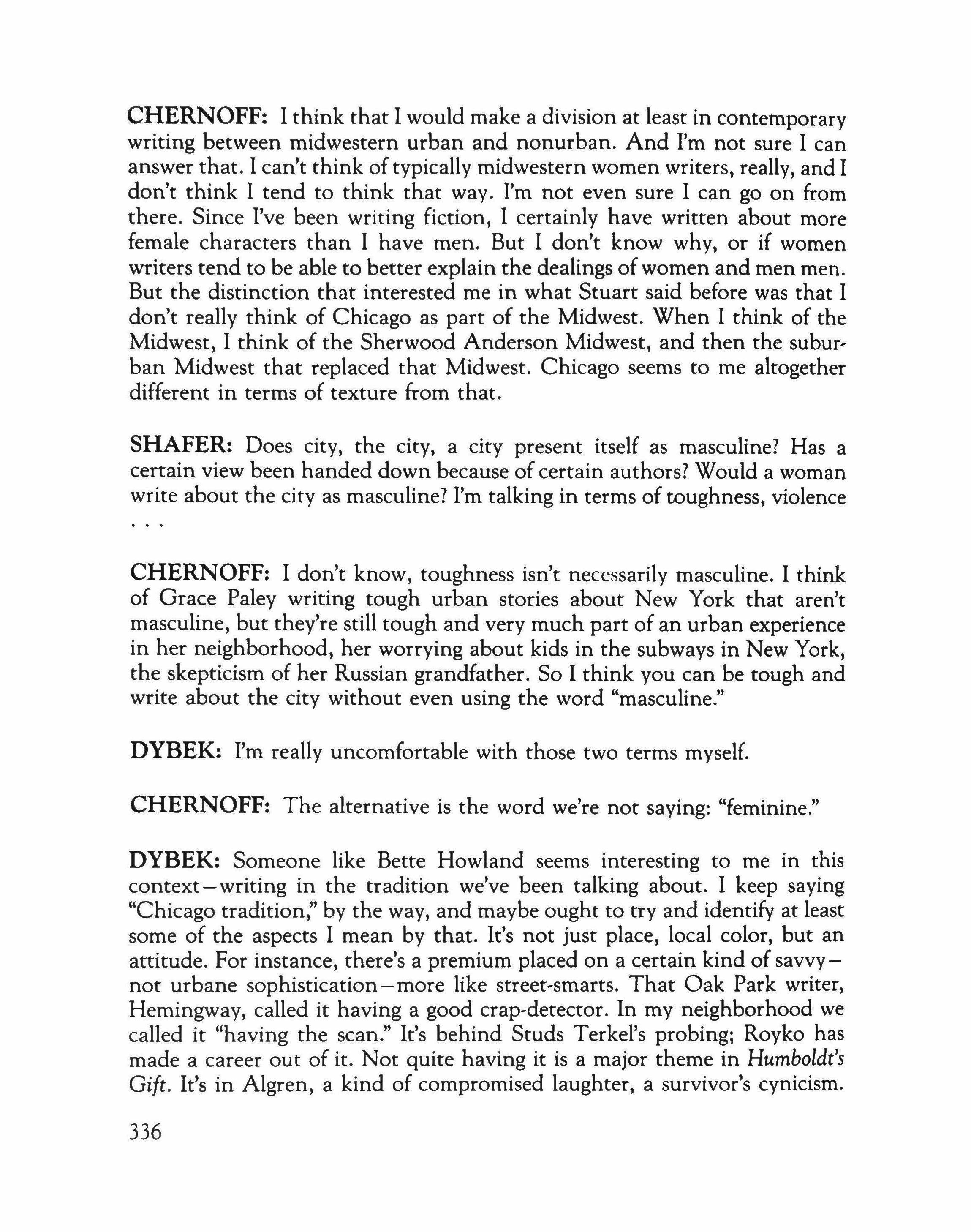
CHERNOFF: I think that I would make a division at least in contemporary writing between midwestern urban and nonurban. And I'm not sure I can answer that. I can't think oftypically midwestern women writers, really, and I don't think I tend to think that way. I'm not even sure I can go on from there. Since I've been writing fiction, I certainly have written about more female characters than I have men. But I don't know why, or if women writers tend to be able to better explain the dealings of women and men men. But the distinction that interested me in what Stuart said before was that I don't really think of Chicago as part of the Midwest. When I think of the Midwest, I think of the Sherwood Anderson Midwest, and then the suburban Midwest that replaced that Midwest. Chicago seems to me altogether different in terms of texture from that.
SHAFER: Does city, the city, a city present itself as masculine? Has a certain view been handed down because of certain authors? Would a woman write about the city as masculine? I'm talking in terms of toughness, violence
CHERNOFF: I don't know, toughness isn't necessarily masculine. I think of Grace Paley writing tough urban stories about New York that aren't masculine, but they're still tough and very much part of an urban experience in her neighborhood, her worrying about kids in the subways in New York, the skepticism of her Russian grandfather. So I think you can be tough and write about the city without even using the word "masculine."
DYBEK: I'm really uncomfortable with those two terms myself.
CHERNOFF: The alternative is the word we're not saying: "feminine."
DYBEK: Someone like Bette Howland seems interesting to me in this context-writing in the tradition we've been talking about. I keep saying "Chicago tradition," by the way, and maybe ought to try and identify at least some of the aspects I mean by that. It's not just place, local color, but an attitude. For instance, there's a premium placed on a certain kind of savvynot urbane sophistication - more like street-smarts. That Oak Park writer, Hemingway, called it having a good crap-detector. In my neighborhood we called it "having the scan." It's behind Studs Terkel's probing; Royko has made a career out of it. Not quite having it is a major theme in Humboldt's Gift. It's in Algren, a kind of compromised laughter, a survivor's cynicism.
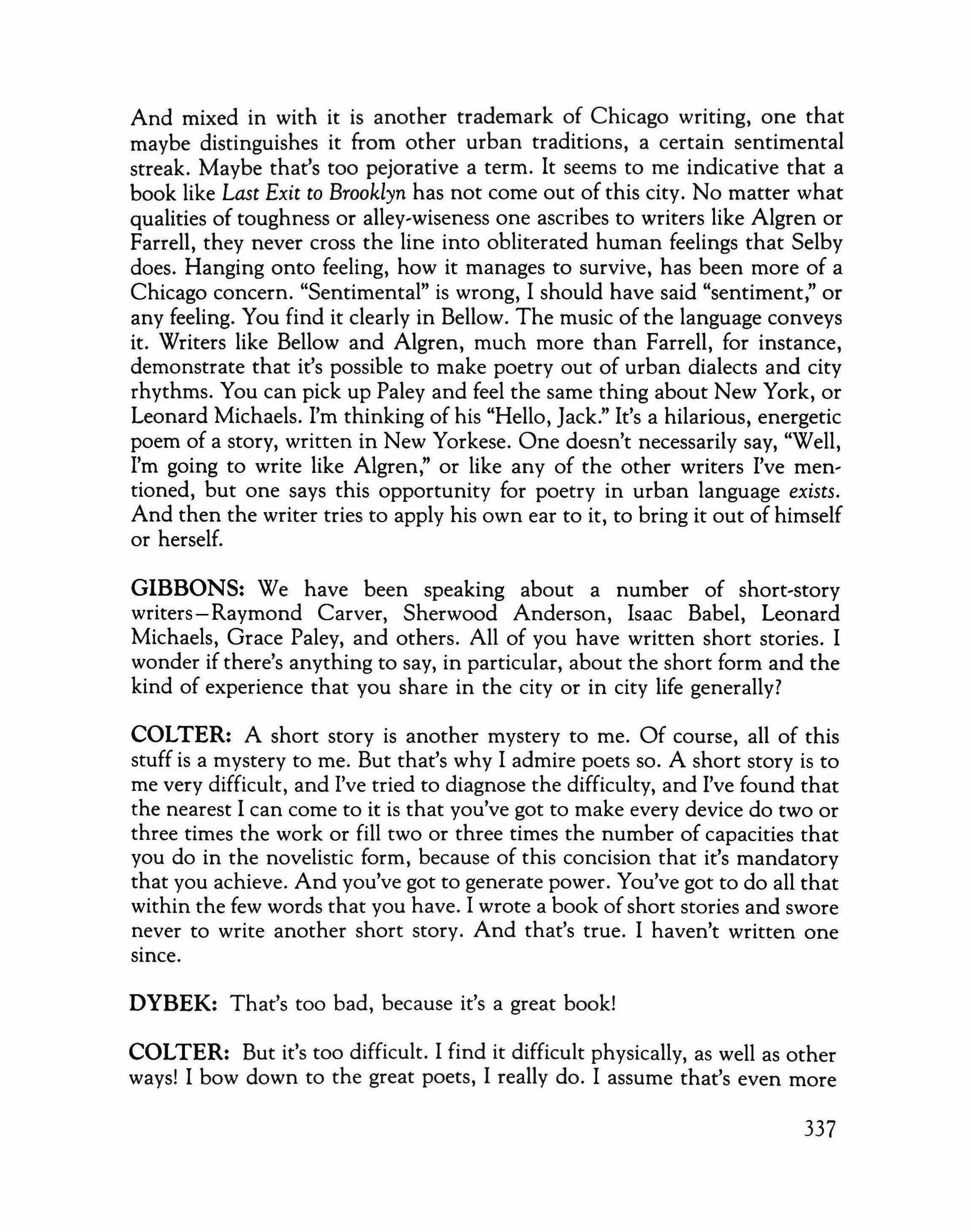
And mixed in with it is another trademark of Chicago writing, one that maybe distinguishes it from other urban traditions, a certain sentimental streak. Maybe that's too pejorative a term. It seems to me indicative that a book like Last Exit to Brooklyn has not come out of this city. No matter what qualities of toughness or alley-wiseness one ascribes to writers like Algren or Farrell, they never cross the line into obliterated human feelings that Selby does. Hanging onto feeling, how it manages to survive, has been more of a Chicago concern. "Sentimental" is wrong, I should have said "sentiment," or any feeling. You find it clearly in Bellow. The music of the language conveys it. Writers like Bellow and Algren, much more than Farrell, for instance, demonstrate that it's possible to make poetry out of urban dialects and city rhythms. You can pick up Paley and feel the same thing about New York, or Leonard Michaels. I'm thinking of his "Hello, Jack." It's a hilarious, energetic poem of a story, written in New Yorkese. One doesn't necessarily say, "Well, I'm going to write like Algren," or like any of the other writers I've men, tioned, but one says this opportunity for poetry in urban language exists. And then the writer tries to apply his own ear to it, to bring it out of himself or herself.
GIBBONS: We have been speaking about a number of short-story writers-Raymond Carver, Sherwood Anderson, Isaac Babel, Leonard Michaels, Grace Paley, and others. All of you have written short stories. I wonder if there's anything to say, in particular, about the short form and the kind of experience that you share in the city or in city life generally?
COLTER: A short story is another mystery to me. Of course, all of this stuff is a mystery to me. But that's why I admire poets so. A short story is to me very difficult, and I've tried to diagnose the difficulty, and I've found that the nearest I can come to it is that you've got to make every device do two or three times the work or fill two or three times the number of capacities that you do in the novelistic form, because of this concision that it's mandatory that you achieve. And you've got to generate power. You've got to do all that within the few words that you have. I wrote a book ofshort stories and swore never to write another short story. And that's true. I haven't written one since.
DYBEK: That's too bad, because it's a great book!
COLTER: But it's too difficult. I find it difficult physically, as well as other ways! I bow down to the great poets, I really do. I assume that's even more
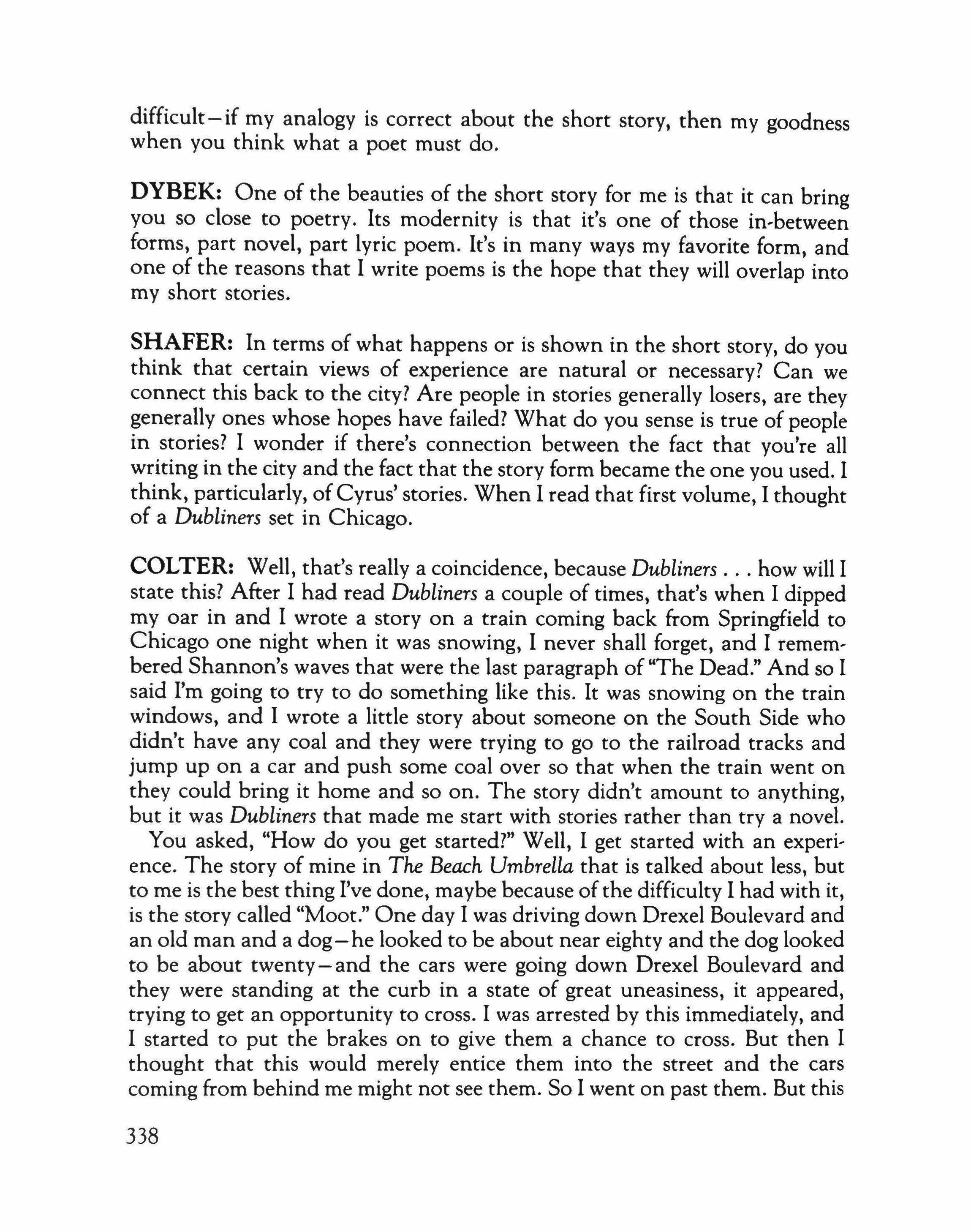
difficult - if my analogy is correct about the short story, then my goodness when you think what a poet must do.
DYBEK: One of the beauties of the short story for me is that it can bring you so close to poetry. Its modernity is that it's one of those in-between forms, part novel, part lyric poem. It's in many ways my favorite form, and one of the reasons that I write poems is the hope that they will overlap into my short stories.
SHAFER: In terms of what happens or is shown in the short story, do you think that certain views of experience are natural or necessary? Can we connect this back to the city? Are people in stories generally losers, are they generally ones whose hopes have failed? What do you sense is true of people in stories? I wonder if there's connection between the fact that you're all writing in the city and the fact that the story form became the one you used. I think, particularly, of Cyrus' stories. When I read that first volume, I thought of a Dubliners set in Chicago.
COLTER: Well, that's really a coincidence, because Dubliners how will I state this? After I had read Dubliners a couple of times, that's when I dipped my oar in and I wrote a story on a train coming back from Springfield to Chicago one night when it was snowing, I never shall forget, and I remembered Shannon's waves that were the last paragraph of "The Dead." And so I said I'm going to try to do something like this. It was snowing on the train windows, and I wrote a little story about someone on the South Side who didn't have any coal and they were trying to go to the railroad tracks and jump up on a car and push some coal over so that when the train went on they could bring it home and so on. The story didn't amount to anything, but it was Dubliners that made me start with stories rather than try a novel.
You asked, "How do you get started?" Well, I get started with an experience. The story of mine in The Beach Umbrella that is talked about less, but to me is the best thing I've done, maybe because ofthe difficulty I had with it, is the story called "Moot." One day I was driving down Drexel Boulevard and an old man and a dog-he looked to be about near eighty and the dog looked to be about twenty - and the cars were going down Drexel Boulevard and they were standing at the curb in a state of great uneasiness, it appeared, trying to get an opportunity to cross. I was arrested by this immediately, and I started to put the brakes on to give them a chance to cross. But then I thought that this would merely entice them into the street and the cars coming from behind me might not see them. So I went on past them. But this
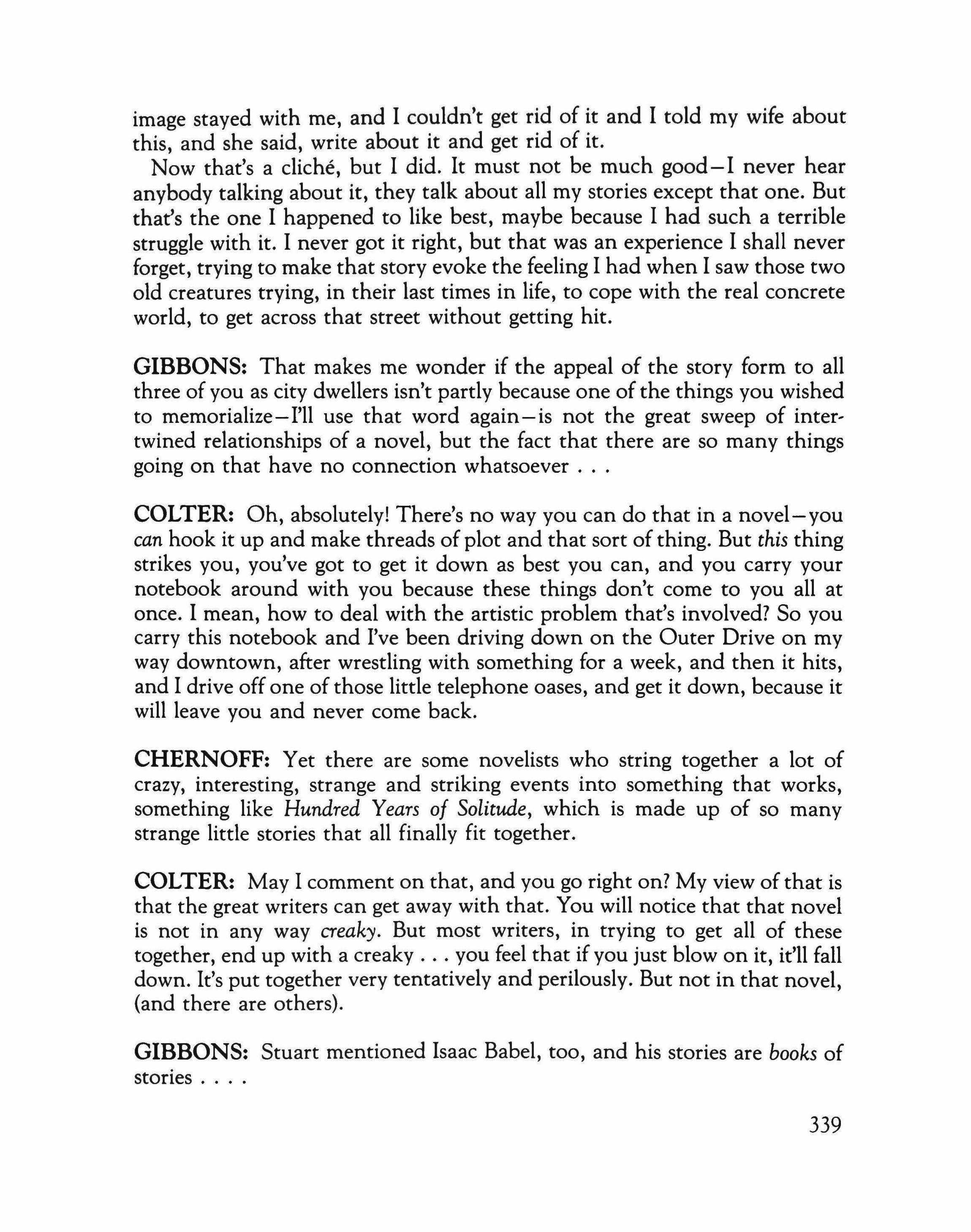
image stayed with me, and I couldn't get rid of it and I told my wife about this, and she said, write about it and get rid of it.
Now that's a cliche, but I did. It must not be much good-I never hear anybody talking about it, they talk about all my stories except that one. But that's the one I happened to like best, maybe because I had such a terrible struggle with it. I never got it right, but that was an experience I shall never forget, trying to make that story evoke the feeling I had when I saw those two old creatures trying, in their last times in life, to cope with the real concrete world, to get across that street without getting hit.
GIBBONS: That makes me wonder if the appeal of the story form to all three of you as city dwellers isn't partly because one of the things you wished to memorialize-I'll use that word again-is not the great sweep of inter, twined relationships of a novel, but the fact that there are so many things going on that have no connection whatsoever
COLTER: Oh, absolutely! There's no way you can do that in a novel-you can hook it up and make threads of plot and that sort of thing. But this thing strikes you, you've got to get it down as best you can, and you carry your notebook around with you because these things don't come to you all at once. I mean, how to deal with the artistic problem that's involved? So you carry this notebook and I've been driving down on the Outer Drive on my way downtown, after wrestling with something for a week, and then it hits, and I drive off one of those little telephone oases, and get it down, because it will leave you and never come back.
CHERNOFF: Yet there are some novelists who string together a lot of crazy, interesting, strange and striking events into something that works, something like Hundred Years of Solitude, which is made up of so many strange little stories that all finally fit together.
COLTER: May I comment on that, and you go right on? My view of that is that the great writers can get away with that. You will notice that that novel is not in any way creaky. But most writers, in trying to get all of these together, end up with a creaky you feel that if you just blow on it, it'll fall down. It's put together very tentatively and perilously. But not in that novel, (and there are others).
GIBBONS: Stuart mentioned Isaac Babel, too, and his stories are books of stories
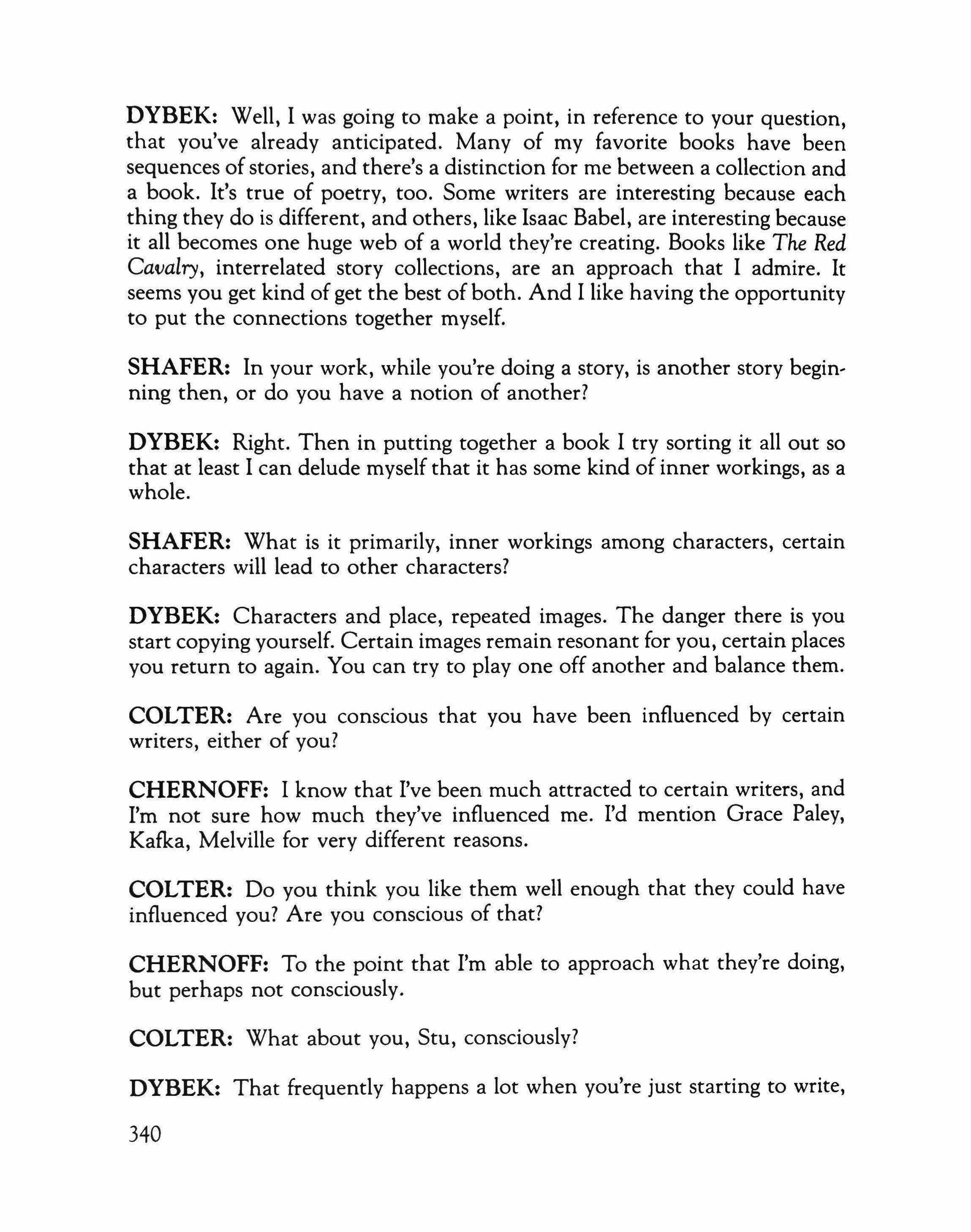
DYBEK: Well, I was going to make a point, in reference to your question, that you've already anticipated. Many of my favorite books have been sequences of stories, and there's a distinction for me between a collection and a book. It's true of poetry, too. Some writers are interesting because each thing they do is different, and others, like Isaac Babel, are interesting because it all becomes one huge web of a world they're creating. Books like The Red Cavalry, interrelated story collections, are an approach that I admire. It seems you get kind of get the best ofboth. And I like having the opportunity to put the connections together myself.
SHAFER: In your work, while you're doing a story, is another story beginning then, or do you have a notion of another?
DYBEK: Right. Then in putting together a book I try sorting it all out so that at least I can delude myself that it has some kind of inner workings, as a whole.
SHAFER: What is it primarily, inner workings among characters, certain characters will lead to other characters?
DYBEK: Characters and place, repeated images. The danger there is you start copying yourself. Certain images remain resonant for you, certain places you return to again. You can try to play one off another and balance them.
COLTER: Are you conscious that you have been influenced by certain writers, either of you?
CHERNOFF: I know that I've been much attracted to certain writers, and I'm not sure how much they've influenced me. I'd mention Grace Paley, Kafka, Melville for very different reasons.
COLTER: Do you think you like them well enough that they could have influenced you? Are you conscious of that?
CHERNOFF: To the point that I'm able to approach what they're doing, but perhaps not consciously.
COLTER: What about you, Stu, consciously?
DYBEK: That frequently happens a lot when you're just starting to write,
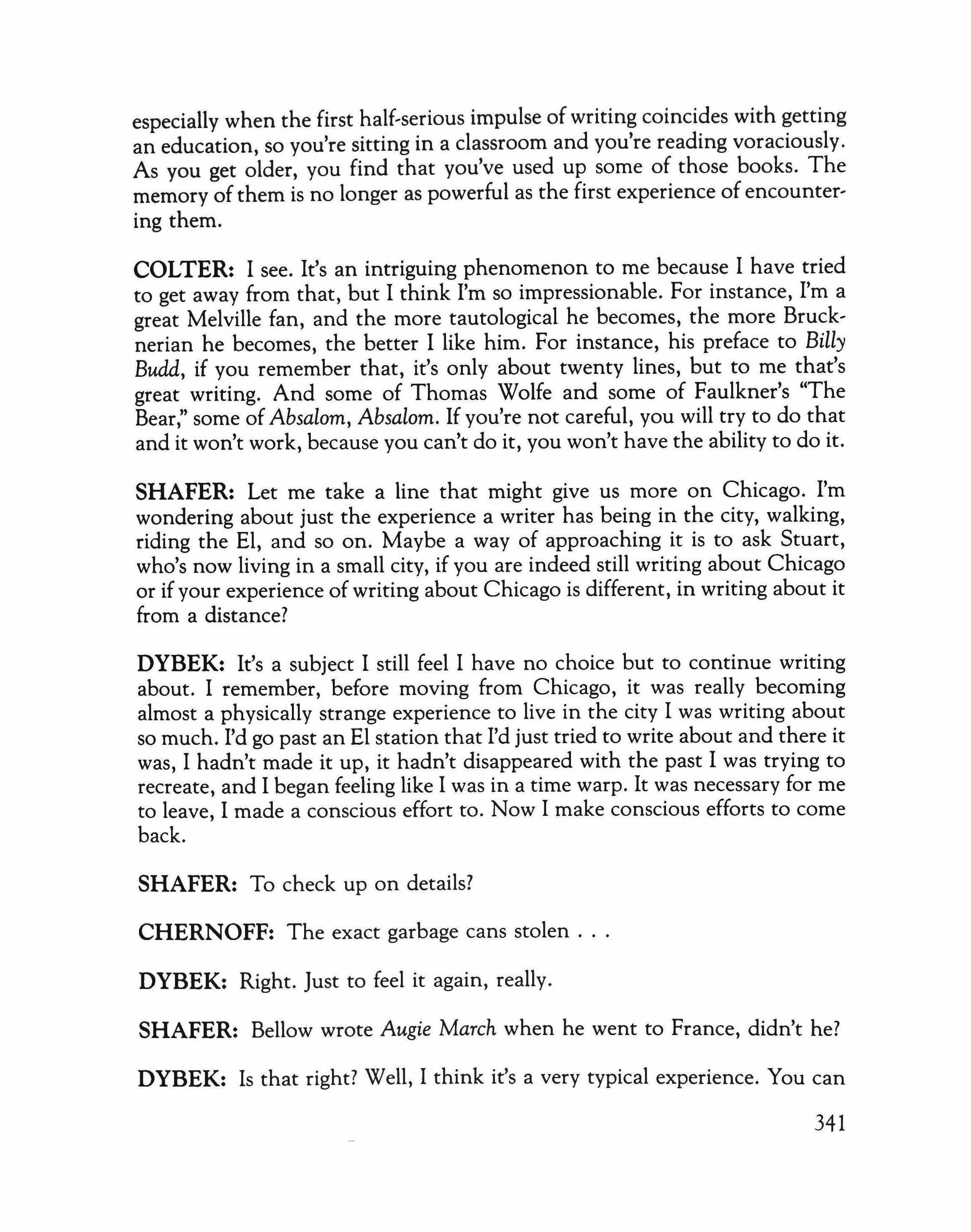
especially when the first half-serious impulse ofwriting coincides with getting an education, so you're sitting in a classroom and you're reading voraciously. As you get older, you find that you've used up some of those books. The memory of them is no longer as powerful as the first experience of encounter, ing them.
COLTER: I see. It's an intriguing phenomenon to me because I have tried to get away from that, but I think I'm so impressionable. For instance, I'm a great Melville fan, and the more tautological he becomes, the more Bruck, nerian he becomes, the better I like him. For instance, his preface to Billy Budd, if you remember that, it's only about twenty lines, but to me that's great writing. And some of Thomas Wolfe and some of Faulkner's "The Bear," some of Absalom, Absalom. If you're not careful, you will try to do that and it won't work, because you can't do it, you won't have the ability to do it.
SHAFER: Let me take a line that might give us more on Chicago. I'm wondering about just the experience a writer has being in the city, walking, riding the EI, and so on. Maybe a way of approaching it is to ask Stuart, who's now living in a small city, if you are indeed still writing about Chicago or if your experience of writing about Chicago is different, in writing about it from a distance?
DYBEK: It's a subject I still feel I have no choice but to continue writing about. I remember, before moving from Chicago, it was really becoming almost a physically strange experience to live in the city I was writing about so much. I'd go past an EI station that I'd just tried to write about and there it was, I hadn't made it up, it hadn't disappeared with the past I was trying to recreate, and I began feeling like I was in a time warp. It was necessary for me to leave, I made a conscious effort to. Now I make conscious efforts to come back.
SHAFER: To check up on details?
CHERNOFF: The exact garbage cans stolen
DYBEK: Right. Just to feel it again, really.
SHAFER: Bellow wrote Augie March when he went to France, didn't he?
DYBEK: Is that right? Well, I think it's a very typical experience. You can
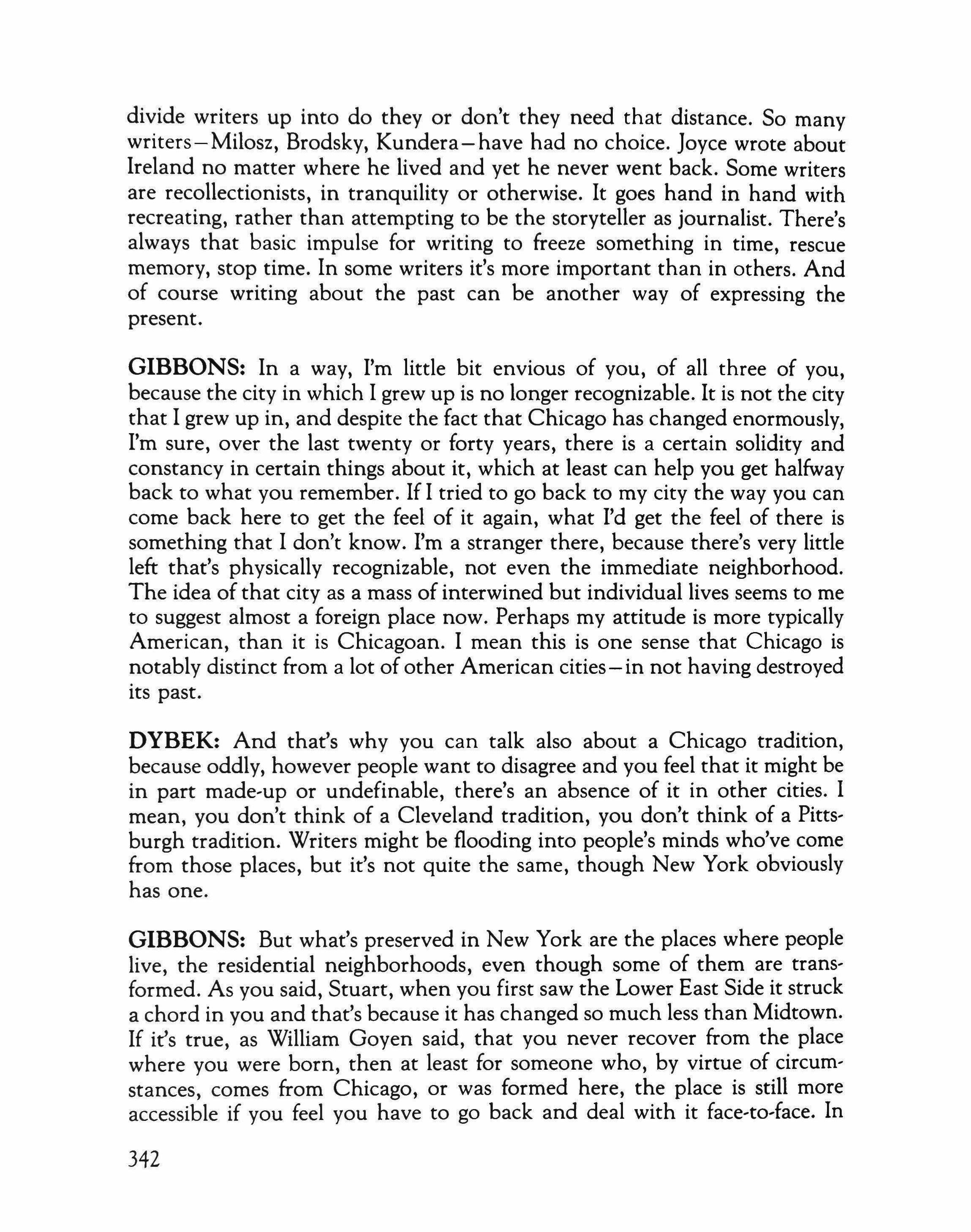
divide writers up into do they or don't they need that distance. So many writers-Milosz, Brodsky, Kundera-have had no choice. Joyce wrote about Ireland no matter where he lived and yet he never went back. Some writers are recollectionists, in tranquility or otherwise. It goes hand in hand with recreating, rather than attempting to be the storyteller as journalist. There's always that basic impulse for writing to freeze something in time, rescue memory, stop time. In some writers it's more important than in others. And of course writing about the past can be another way of expressing the present.
GIBBONS: In a way, I'm little bit envious of you, of all three of you, because the city in which I grew up is no longer recognizable. It is not the city that I grew up in, and despite the fact that Chicago has changed enormously, I'm sure, over the last twenty or forty years, there is a certain solidity and constancy in certain things about it, which at least can help you get halfway back to what you remember. If I tried to go back to my city the way you can come back here to get the feel of it again, what I'd get the feel of there is something that I don't know. I'm a stranger there, because there's very little left that's physically recognizable, not even the immediate neighborhood. The idea of that city as a mass of interwined but individual lives seems to me to suggest almost a foreign place now. Perhaps my attitude is more typically American, than it is Chicagoan. I mean this is one sense that Chicago is notably distinct from a lot of other American cities - in not having destroyed its past.
DYBEK: And that's why you can talk also about a Chicago tradition, because oddly, however people want to disagree and you feel that it might be in part made-up or undefinable, there's an absence of it in other cities. I mean, you don't think of a Cleveland tradition, you don't think of a Pitts, burgh tradition. Writers might be flooding into people's minds who've come from those places, but it's not quite the same, though New York obviously has one.
GIBBONS: But what's preserved in New York are the places where people live, the residential neighborhoods, even though some of them are trans' formed. As you said, Stuart, when you first saw the Lower East Side it struck a chord in you and that's because it has changed so much less than Midtown. If it's true, as William Goyen said, that you never recover from the place where you were born, then at least for someone who, by virtue of circum' stances, comes from Chicago, or was formed here, the place is still more accessible if you feel you have to go back and deal with it face-to-face. In

some places, the place you can't recover from has been erased or destroyed and is harder to recover from, therefore. Perhaps you need that shock of reality sometimes, you need to be slapped in the face with the very same El station that you've written about in order to get something that's helpful and salubrious from that shock.
CHERNOFF: I think that, because Chicago hasn't changed to that extent, you're allowed personal shrines that would disappear in smaller places. One of the highlights of my young life was taking the IC train downtown to Marshall Field's. Marshall Field's still looks like a big cathedral to me. I don't go back to it, I don't visit it weekly, as you would a church, but it's still there, it's there in some crazy, inane, spiritual way.
Until recently I don't think I appreciated the city the way I do now, because I didn't need it in the way I do now, to write. So I don't think that there are particular shocks for me in that way. I think that there's a wealth of material for me that was sitting here for some thirty years, that I didn't really pay much attention to because I was interested in pretending I wasn't from anywhere. And now that my fiction is more rooted in the place, it's almost a way to rediscover it. The neighborhood I grew up in isn't the neighborhood that I grew up in anymore. It's totally changed, but certain landmarks, ballparks and things like that will always be there and are important. The city also brought me in contact personally with social issues that might not have ever struck me except as ideas in any other place. For instance, in my last few years of grammar school our school started being integrated and there were racial overtones to a lot of very innocent childhood things, like parties where mixed groups would be invited and certain parents would get very upset. Certain realizations come pretty early, at eleven, twelve, or thirteen, that there is a life outside of your little neighborhood, and problems right there that I don't think you'd realize, living in a totally homogeneous community.
SHAFER: I was wondering before, in fact, to what extent a city writer necessarily becomes a political writer, because I thought that, in your last book, Cyrus, you were exploring some political issues, certainly with historical figures, and the black movement
COLTER: Really? That was not my intention.
SHAFER: Let me ask you then you were mentioning King and Malcolm X and so on.
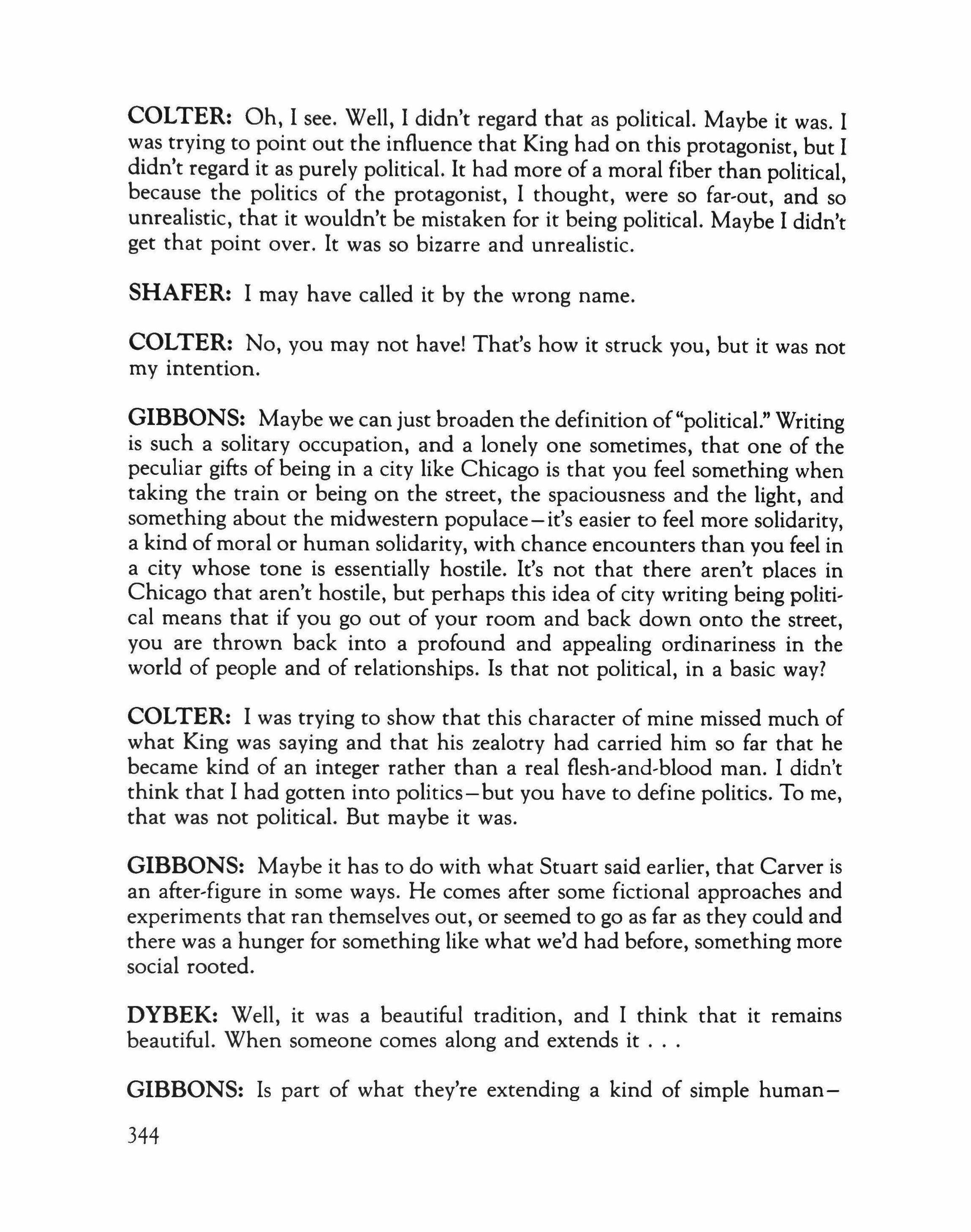
COLTER: Oh, I see. Well, I didn't regard that as political. Maybe it was. I was trying to point out the influence that King had on this protagonist, but I didn't regard it as purely political. It had more of a moral fiber than political, because the politics of the protagonist, I thought, were so far-out, and so unrealistic, that it wouldn't be mistaken for it being political. Maybe I didn't get that point over. It was so bizarre and unrealistic.
SHAFER: I may have called it by the wrong name.
COLTER: No, you may not have! That's how it struck you, but it was not my intention.
GIBBONS: Maybe we can just broaden the definition of"political." Writing is such a solitary occupation, and a lonely one sometimes, that one of the peculiar gifts of being in a city like Chicago is that you feel something when taking the train or being on the street, the spaciousness and the light, and something about the midwestern populace-it's easier to feel more solidarity, a kind of moral or human solidarity, with chance encounters than you feel in a city whose tone is essentially hostile. It's not that there aren't places in Chicago that aren't hostile, but perhaps this idea of city writing being political means that if you go out of your room and back down onto the street, you are thrown back into a profound and appealing ordinariness in the world of people and of relationships. Is that not political, in a basic way?
COLTER: I was trying to show that this character of mine missed much of what King was saying and that his zealotry had carried him so far that he became kind of an integer rather than a real flesh-and-blood man. I didn't think that I had gotten into politics-but you have to define politics. To me, that was not political. But maybe it was.
GIBBONS: Maybe it has to do with what Stuart said earlier, that Carver is an after-figure in some ways. He comes after some fictional approaches and experiments that ran themselves out, or seemed to go as far as they could and there was a hunger for something like what we'd had before, something more social rooted.
DYBEK: Well, it was a beautiful tradition, and I think that it remains beautiful. When someone comes along and extends it
GIBBONS: Is part of what they're extending a kind of simple human344

"compassion" seems the wrong word - a simple human solidarity that was lacking in another kind of writing?
DYBEK: I suppose that is one of the compromises one makes in meta, fiction, something a writer risks losing in self-consciously reducing the world to language. I agree with what you're saying, as far as its being a risk. Of course, besides Carver, there are numerous others, a generation of people who are writing along more realistic lines.
CHERNOFF: I'd like to take the other side for a moment. I remember a comment by Hugh Kenner in which he said that had Beckett written Waiting for Godot about waiting for several people in a town during the French Resistance movement in World War II, making an unsuccessful underground connection, the play wouldn't have lasted, although it's possibly about that; and that in meta-fiction, people try to make something that's maybe more lasting by stripping the moment of its particulars or of its landscape.
GIBBONS: I think that Kenner is misleading, because he's overlooking the fact that that play has a tremendous amount of feeling in it, and a lot of meta-fiction is not concerned with feeling at all, but with mind. People usually say that meta-fiction or sophisticated experiment like that is invariably associated with city, with cosmopolitan, literary culture, and yet it seems to me no less true that a political content, a kind of compassion for fragmented lives, is no less a city phenomenon. And there is also experiment with feeling, which can be rural, as in Goyen's novels.
DYBEK: I don't particularly prefer one to the other. It depends on how freshly the person is working in whatever mode. I think that some of Barthelme's stories seem glib, for instance, but others are really isn't one of his collections called Sadness? There truly is that genuine, novel feeling in some of the stories, and he's able to approach a certain complex of human feelings that maybe realism can't get at.
CHERNOFF: Sometimes it's as if fabulists are trying to work consciously with all the odds against expressing emotion. They work with all those odds in the story and still are able to bring it in, I think, in the better stories ofthat genre. I don't think experimentation is devoid of feeling. It's just that these writers are juggling. There's this problem, this problem, and this problem in communicating, and I'll put them all in the story and see if I still can communicate.
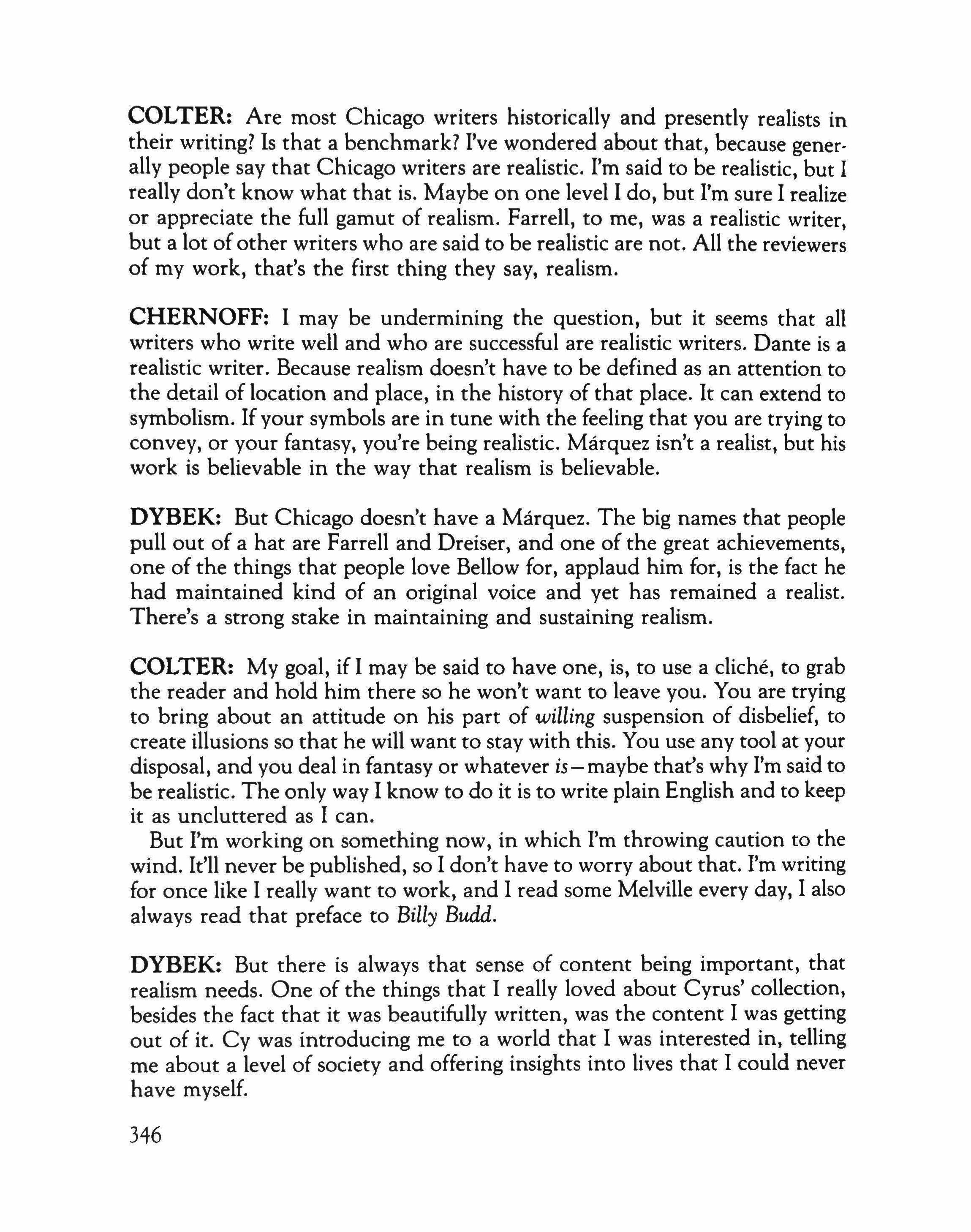
COLTER: Are most Chicago writers historically and presently realists in their writing? Is that a benchmark? I've wondered about that, because generally people say that Chicago writers are realistic. I'm said to be realistic, but I really don't know what that is. Maybe on one level I do, but I'm sure I realize or appreciate the full gamut of realism. Farrell, to me, was a realistic writer, but a lot ofother writers who are said to be realistic are not. All the reviewers of my work, that's the first thing they say, realism.
CHERNOFF: I may be undermining the question, but it seems that all writers who write well and who are successful are realistic writers. Dante is a realistic writer. Because realism doesn't have to be defined as an attention to the detail of location and place, in the history of that place. It can extend to symbolism. If your symbols are in tune with the feeling that you are trying to convey, or your fantasy, you're being realistic. Marquez isn't a realist, but his work is believable in the way that realism is believable.
DYBEK: But Chicago doesn't have a Marquez. The big names that people pull out of a hat are Farrell and Dreiser, and one of the great achievements, one of the things that people love Bellow for, applaud him for, is the fact he had maintained kind of an original voice and yet has remained a realist. There's a strong stake in maintaining and sustaining realism.
COLTER: My goal, if I may be said to have one, is, to use a cliche, to grab the reader and hold him there so he won't want to leave you. You are trying to bring about an attitude on his part of willing suspension of disbelief, to create illusions so that he will want to stay with this. You use any tool at your disposal, and you deal in fantasy or whatever is-maybe that's why I'm said to be realistic. The only way I know to do it is to write plain English and to keep it as uncluttered as I can.
But I'm working on something now, in which I'm throwing caution to the wind. It'll never be published, so I don't have to worry about that. I'm writing for once like I really want to work, and I read some Melville every day, I also always read that preface to Billy Budd.
DYBEK: But there is always that sense of content being important, that realism needs. One of the things that I really loved about Cyrus' collection, besides the fact that it was beautifully written, was the content I was getting out of it. Cy was introducing me to a world that I was interested in, telling me about a level of society and offering insights into lives that I could never have myself.

CHERNOFF: To write, we all have to fabricate some kind ofworld and the difference is how much we use what's immediately available to us and how much fabrication we feel we have to graft onto that.
SHAFER: This idea offantasy, that's what I'm taken with, the combination of, for the lack of better words, fantasy and reality in Stuart's work-and yet the fantasy and the myth seem to come right out of the reality, and they come right out of Chicago reality, because of the kinds of stories people have known for so long.
DYBEK: That's how eastern Europe I guess, that's how all people are. I know that my grandmother would be telling me how to make bread one minute and the next minute she'd say "By the way, Mr. Zlotnik's ghost dropped in the other night." And I'd look at her, and she'd start telling me how the dead came and started talking to her. And, you know, until this day I don't know whether she was kidding me, or whether that was some kind of a folk way of expressing a death in the neighborhood, which had been carried over from her village, or whether she really thought that this dead, old guy was showing up.
GIBBONS: Perhaps it's the peculiar gift ofthe writer to be able to restore to us who live in cities the forgotten realm in which we, or those before us, used to dwell. I met a woman in Caracas, Venezuela, once-a big city with lots of money, office buildings, and hillside slums around the fringes-and she told me that every morning her maid came into the city to her house, and told her a story. These stories, she said, were like the apparently fantastical tales in Garcia Marquez, but they were simply what had happened the night before where she lived. Her friend Juan had a glass eye, which he had never told anyone about, and as he was about to take his favorite and best rooster to the cockfights, he bent over and the eye fell out and the rooster gobbled it. He couldn't kill the rooster, his best, and he couldn't let anyone see him without his glass eye. So he took out his knife and cut a hole in its throat, retrieved the eye from its gullet, and carefully stitched the cock back up, and went to the fights. When he walked in, someone yelled at him, "Hey, Juan, you're late-what happened?" and he just smiled. Some junction of city and country makes that tale possible, and perhaps in the work of the three of you, there is an equivalent, the juncture of a strong ethnic society and the vast sprawl of lives in the city.


The machine would not cooperate. It photographed Oleg's original, but when he looked in the metal pan, the duplicate was zebra-striped and wordless. Three more times he inserted the grocery ad. He got back stripes leaning toward each other and crossing in the middle like insane skate blades.
"Please, if you will."
It was obvious that the woman wasn't interested in her job. You could tell by the way she handled the paper. Her nails tore the pleasant green wrapping that reminded him of larger American money. Her eyes never met the machine that perhaps needed ink, fluid, straightening or encouragement. Her behavior wouldn't be tolerated if he ran the place.
"Can I ask you something?" she said.
"It is free country. One may ask what one wishes."
"You come here everyday with something different. I know I'm not supposed to look, but here you are again Xeroxing garbage and your machine is acting up. Why do you make me so busy?"
"Please, I will tell you. The duplication of materials is of great interest to me. Since I came to this country, for three years now, I make copies of everything. If I could, I would copy my hair, my clothing, my food and my bowels."
She had walked away. He left the office carrying the perfect finished copies of the grocery ads. These went into the large books stamped "souvenirs" purchased from Woolworth's. He had filled fourteen already.
Now he was back in his small apartment, whose attitude toward America was one of total acceptance. Plastic molded coral and gold-flecked seats blended with torn leather. A portrait of a sailboat edged up to a Degas dancer. A Cubs schedule followed. Family photos marched along in the parade. A wall clock resembling an owl's face kept the beat. And leading the
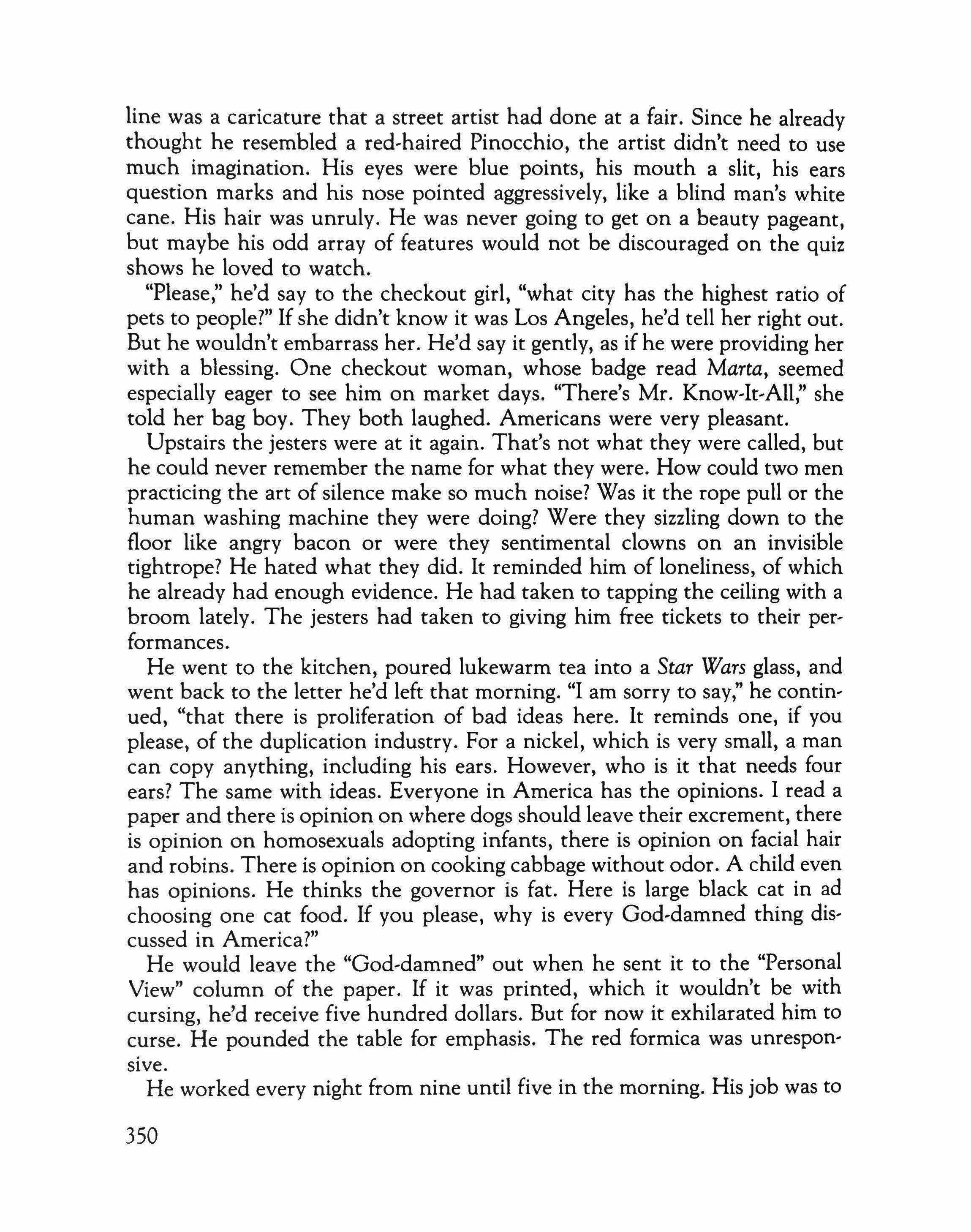
line was a caricature that a street artist had done at a fair. Since he already thought he resembled a red-haired Pinocchio, the artist didn't need to use much imagination. His eyes were blue points, his mouth a slit, his ears question marks and his nose pointed aggressively, like a blind man's white cane. His hair was unruly. He was never going to get on a beauty pageant, but maybe his odd array of features would not be discouraged on the quiz shows he loved to watch.
"Please," he'd say to the checkout girl, "what city has the highest ratio of pets to people?" If she didn't know it was Los Angeles, he'd tell her right out. But he wouldn't embarrass her. He'd say it gently, as if he were providing her with a blessing. One checkout woman, whose badge read Marta, seemed especially eager to see him on market days. "There's Mr. Know-It-All," she told her bag boy. They both laughed. Americans were very pleasant.
Upstairs the jesters were at it again. That's not what they were called, but he could never remember the name for what they were. How could two men practicing the art of silence make so much noise? Was it the rope pull or the human washing machine they were doing? Were they sizzling down to the floor like angry bacon or were they sentimental clowns on an invisible tightrope? He hated what they did. It reminded him of loneliness, of which he already had enough evidence. He had taken to tapping the ceiling with a broom lately. The jesters had taken to giving him free tickets to their performances.
He went to the kitchen, poured lukewarm tea into a Star Wars glass, and went back to the letter he'd left that morning. "I am sorry to say:' he continued, "that there is proliferation of bad ideas here. It reminds one, if you please, of the duplication industry. For a nickel, which is very small, a man can copy anything, including his ears. However, who is it that needs four ears? The same with ideas. Everyone in America has the opinions. I read a paper and there is opinion on where dogs should leave their excrement, there is opinion on homosexuals adopting infants, there is opinion on facial hair and robins. There is opinion on cooking cabbage without odor. A child even has opinions. He thinks the governor is fat. Here is large black cat in ad choosing one cat food. If you please, why is every God-damned thing discussed in America?"
He would leave the "God-damned" out when he sent it to the "Personal View" column of the paper. If it was printed, which it wouldn't be with cursing, he'd receive five hundred dollars. But for now it exhilarated him to curse. He pounded the table for emphasis. The red formica was unresponsive.
He worked every night from nine until five in the morning. His job was to

sit at a switchboard that was hooked into store alarms. If an alarm rang, his switchboard would wail, and he would call the police, giving them a code, and call the store owner with the news. In his eleven months of employment, there'd been only twenty-seven alarms, and most of those were due to faulty wiring. He was able to spend most of his time sleeping, just as Mr. Kaplan had suggested upon hiring him. Mr. Kaplan had been insanely happy to give him a job. Just sixty years ago, Mr. Kaplan's own father had come over here, untrained, illiterate, and if it weren't for a landsman, he would have perished. Mr. Kaplan got very emotional then and swiped at his eyes with a big hankie and hugged Oleg Lum stiffly and told him, "Welcome, Brother." Oleg thought Kaplan might burst into an American spiritual song. Although his job paid minimum wage, he had his days free to do as he wished. Usually he wished to go to the library.
The influx of Russian immigrants to the Rogers Park area had altered its environment. Russian shoemakers hung shingles on every block. Several Russian delicatessens displayed gleaming samovars next to pickled fish in windows, and the library had begun to carry a good amount of Russian language books, but mostly the classics. He had already read those books in Russian, which he had once taught. Now he wanted to read American books rich in history: Sacco and Vanzetti, Sally Rand, Nat Turner and Howard Hughes. And when he flashed his neat green library card at the girl, who even in summer required a sweater, she always smiled at him. Maybe she, like Mr. Kaplan, assumed he was uneducated, a pretender to the American shelves. She never spoke, but once, when he'd asked for a book on the process of photocopying, she had looked worried, as if her patron might be a spy.
He liked sitting at the blond wood tables with the other patrons. Though protocol barred speech, there was good spirit to share in silent reading. He liked watching the old men who moved their lips as they read. Maybe their false teeth read words differently, trying to trick them. And children, he noticed, read in the same way. For the last week he'd observed a girl about eleven years old who had been sitting across from him. She always used encyclopedias and took notes. She was plump and had hair that wouldn't cooperate. It deserted its braids and bristled in front like cactus. Maybe even American plants had opinions, he suddenly thought.
"H 7 M" k" ave a pen. me s outta m
"Please, for you to keep." He handed a ballpoint to the girl. Americans were generous, and so he wished to practice in small ways. He kept pens and paper clips and rubber bands and notepaper in his pockets for such occasions.
"Thanks," she said and began copying again.
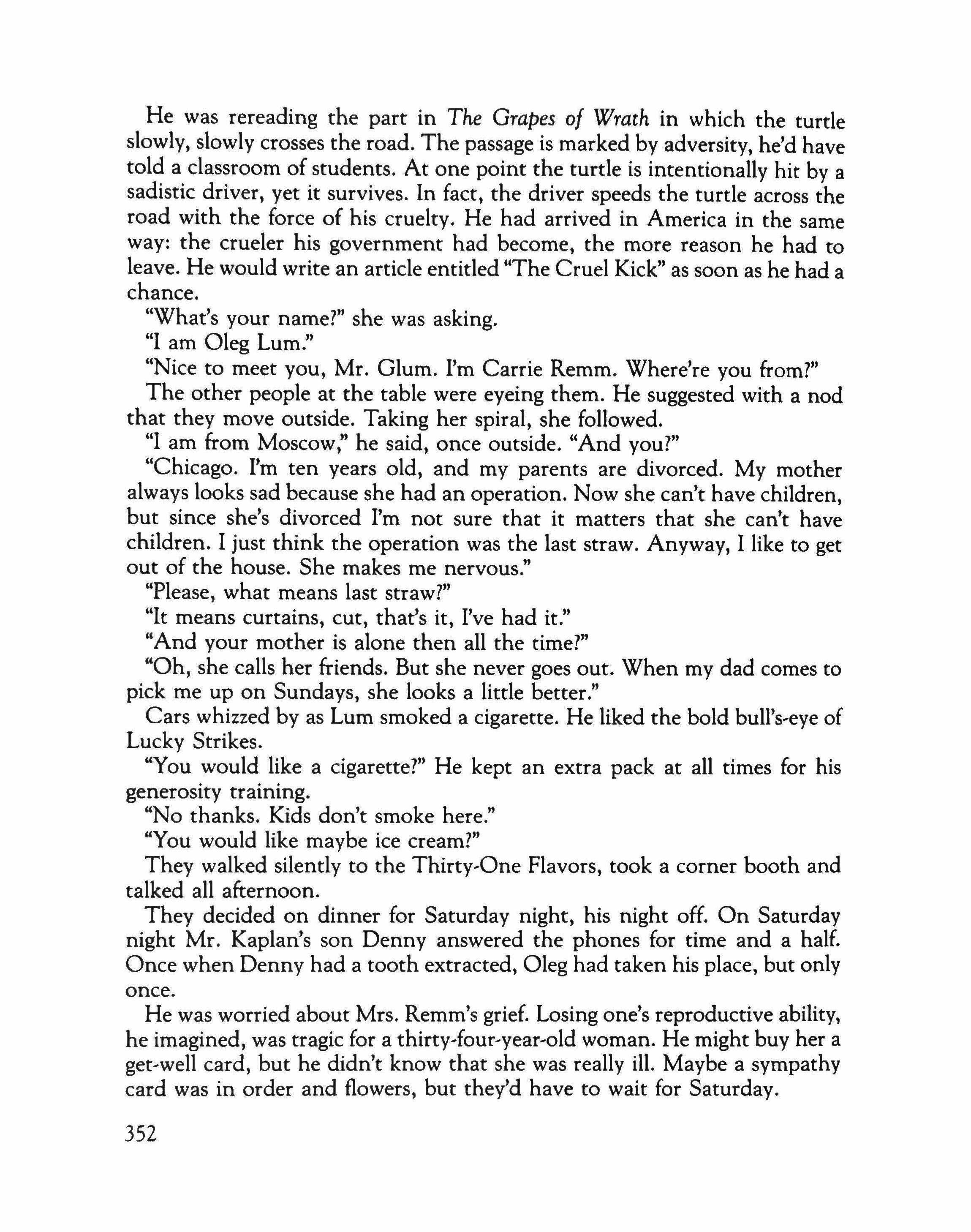
He was rereading the part in The Grapes of Wrath in which the turtle slowly, slowly crosses the road. The passage is marked by adversity, he'd have told a classroom of students. At one point the turtle is intentionally hit by a sadistic driver, yet it survives. In fact, the driver speeds the turtle across the road with the force of his cruelty. He had arrived in America in the same way: the crueler his government had become, the more reason he had to leave. He would write an article entitled "The Cruel Kick" as soon as he had a chance.
"What's your name?" she was asking.
"I am Oleg Lum."
"Nice to meet you, Mr. Glum. I'm Carrie Remm. Where're you from?"
The other people at the table were eyeing them. He suggested with a nod that they move outside. Taking her spiral, she followed.
"I am from Moscow," he said, once outside. "And you?"
"Chicago. I'm ten years old, and my parents are divorced. My mother always looks sad because she had an operation. Now she can't have children, but since she's divorced I'm not sure that it matters that she can't have children. I just think the operation was the last straw. Anyway, I like to get out of the house. She makes me nervous."
"Please, what means last straw?"
"It means curtains, cut, that's it, I've had it."
"And your mother is alone then all the time?"
"Oh, she calls her friends. But she never goes out. When my dad comes to pick me up on Sundays, she looks a little better."
Cars whizzed by as Lum smoked a cigarette. He liked the bold bull's-eye of Lucky Strikes.
"You would like a cigarette?" He kept an extra pack at all times for his generosity training.
"No thanks. Kids don't smoke here."
"You would like maybe ice cream?"
They walked silently to the Thirty-One Flavors, took a corner booth and talked all afternoon.
They decided on dinner for Saturday night, his night off. On Saturday night Mr. Kaplan's son Denny answered the phones for time and a half. Once when Denny had a tooth extracted, Oleg had taken his place, but only once.
He was worried about Mrs. Rernm's grief. Losing one's reproductive ability, he imagined, was tragic for a thirty-four-year-old woman. He might buy her a get-well card, but he didn't know that she was really ill. Maybe a sympathy card was in order and flowers, but they'd have to wait for Saturday.
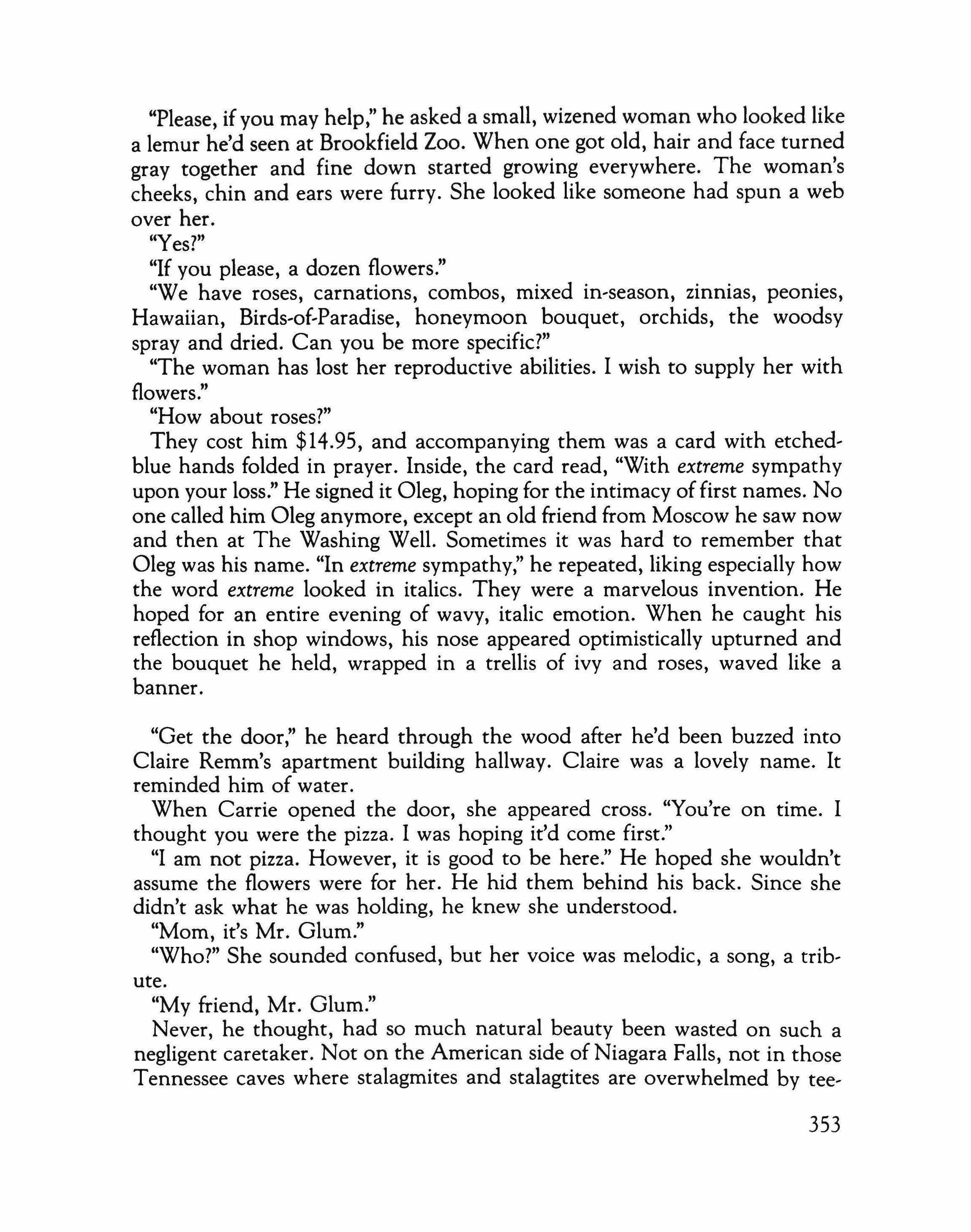
"Please, if you may help," he asked a small, wizened woman who looked like a lemur he'd seen at Brookfield Zoo. When one got old, hair and face turned gray together and fine down started growing everywhere. The woman's cheeks, chin and ears were furry. She looked like someone had spun a web over her.
"Yes?"
"If you please, a dozen flowers."
"We have roses, carnations, combos, mixed in-season, zinnias, peonies, Hawaiian, Birds-of-Paradise, honeymoon bouquet, orchids, the woodsy spray and dried. Can you be more specific?"
"The woman has lost her reproductive abilities. I wish to supply her with flowers."
"How about roses?"
They cost him $14.95, and accompanying them was a card with etchedblue hands folded in prayer. Inside, the card read, "With extreme sympathy upon your loss." He signed it Oleg, hoping for the intimacy offirst names. No one called him Oleg anymore, except an old friend from Moscow he saw now and then at The Washing Well. Sometimes it was hard to remember that Oleg was his name. "In extreme sympathy," he repeated, liking especially how the word extreme looked in italics. They were a marvelous invention. He hoped for an entire evening of wavy, italic emotion. When he caught his reflection in shop windows, his nose appeared optimistically upturned and the bouquet he held, wrapped in a trellis of ivy and roses, waved like a banner.
"Get the door," he heard through the wood after he'd been buzzed into Claire Remm's apartment building hallway. Claire was a lovely name. It reminded him of water.
When Carrie opened the door, she appeared cross. "You're on time. I thought you were the pizza. I was hoping it'd come first."
"I am not pizza. However, it is good to be here." He hoped she wouldn't assume the flowers were for her. He hid them behind his back. Since she didn't ask what he was holding, he knew she understood.
"Mom, it's Mr. Glum."
"Who?" She sounded confused, but her voice was melodic, a song, a tribute.
"My friend, Mr. Glum."
Never, he thought, had so much natural beauty been wasted on such a negligent caretaker. Not on the American side of Niagara Falls, not in those Tennessee caves where stalagmites and stalagtites are overwhelmed by tee-
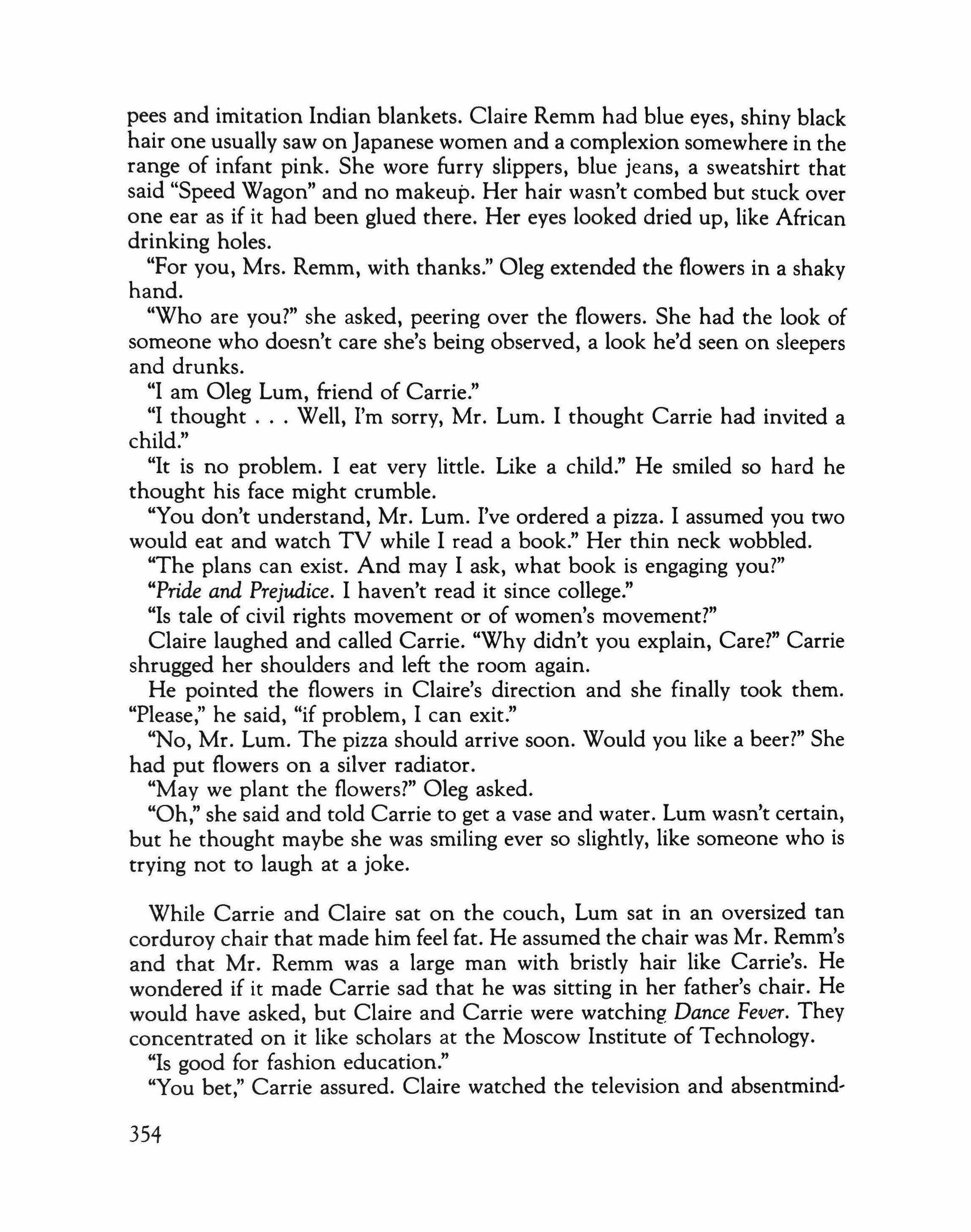
pees and imitation Indian blankets. Claire Remm had blue eyes, shiny black hair one usually saw on Japanese women and a complexion somewhere in the range of infant pink. She wore furry slippers, blue jeans, a sweatshirt that said "Speed Wagon" and no makeup. Her hair wasn't combed but stuck over one ear as if it had been glued there. Her eyes looked dried up, like African drinking holes.
"For you, Mrs. Remm, with thanks." Oleg extended the flowers in a shaky hand.
"Who are you?" she asked, peering over the flowers. She had the look of someone who doesn't care she's being observed, a look he'd seen on sleepers and drunks.
"I am Oleg Lum, friend of Carrie."
"I thought Well, I'm sorry, Mr. Lum. I thought Carrie had invited a child."
"It is no problem. I eat very little. Like a child." He smiled so hard he thought his face might crumble.
"You don't understand, Mr. Lum. I've ordered a pizza. I assumed you two would eat and watch TV while I read a book." Her thin neck wobbled.
"The plans can exist. And may I ask, what book is engaging you?"
"Pride and Prejudice. I haven't read it since college."
"Is tale of civil rights movement or of women's movement?" Claire laughed and called Carrie. "Why didn't you explain, Care?" Carrie shrugged her shoulders and left the room again.
He pointed the flowers in Claire's direction and she finally took them. "Please," he said, "if problem, I can exit."
"No, Mr. Lum. The pizza should arrive soon. Would you like a beer?" She had put flowers on a silver radiator.
"May we plant the flowers?" Oleg asked.
"Oh," she said and told Carrie to get a vase and water. Lum wasn't certain, but he thought maybe she was smiling ever so slightly, like someone who is trying not to laugh at a joke.
While Carrie and Claire sat on the couch, Lum sat in an oversized tan corduroy chair that made him feel fat. He assumed the chair was Mr. Remm's and that Mr. Remm was a large man with bristly hair like Carrie's. He wondered if it made Carrie sad that he was sitting in her father's chair. He would have asked, but Claire and Carrie were watching Dance Fever. They concentrated on it like scholars at the Moscow Institute of Technology.
"Is good for fashion education."
"You bet," Carrie assured. Claire watched the television and absentmind-

edly dissected the pizza, which sat in the middle of the floor. Carrie had placed the roses next to the pizza in a green vase that hid their stems. He wondered whether Claire might reach for pizza and come up with a rose. The room appeared freshly painted, meaning that everything had been taken down and the walls whitewashed. No decorations had been rehung where picture hooks and curtain rods waited. It looked as if a civilization had perished there. The place made him feel foolish. It was not the first American home he'd ever visited; Mrs. Kaplan's was, with its plastic-covered everything and miniature dog statues and candelabra. But hers could have been the aberration. Suppose Americans were more like Danes in character than he'd imagined: melancholic, spare and joyless.
During a commercial he spoke. "Mrs. Rernm, your daughter is very clever girl and hard worker at library. She tells me about you. She is sorry for you."
"She is?" The voice was shrill, a verbal grimace.
"She is sad that you are not able, may I say, to reproduce."
"Carrie, why did you tell him that?" The entire room vibrated with new energy. He imagined lamps crashing to the floor. Carrie shrugged her non, chalant shoulders.
"I am sorry, Mrs. Remrn, to cause this trouble. She is loving you and wanting to be of help."
Now Claire was smiling and Carrie exhaling. It couldn't have been his explanation. Some signals, he imagined, perhaps like those he had heard that third-base coaches use to coax on their runners, must have been exchanged in the eve-blink, The eye-blink must have been invented for such a purpose. What had transpired in the invisible moment was a detente. Finally Carrie spoke. "Mom, he's O.K. to tell things to. Who do you think he knows?"
Lum smiled. He knew he'd been insulted, but the insult was harmless. Besides, it had made Claire smile again.
"Mr. Lum," she began, "I expected a little Russian boy. You know. Pointy ears. Fat cheeks. Shorts. Sandals. Instead, you walk in knowing everything about me, bringing me flowers. I guess I must be very glum!"
They all laughed. It was a moment ofjoy, one he'd recall along with his first erection and leaving Russia. A triptych of pleasure. Claire kept laughing even after he and Carrie had finished. Quacking and quacking like a beautiful, blue,eyed duck until she said, "I haven't read the card. Let's read the card." She opened it with high drama and stared at Lum's hopeful smile. More signals were exchanged with Carrie, who, after reading the card aloud, stared at Lum too. Mother and daughter then slapped hands palm to palm, and Claire suggested that they all take a walk.
"Better yet," Oleg said, "a trick is up the sleeve. I have procured tickets for

an event of pantomime to begin in twenty minutes. We should begin our arrival now."
Claire excused herself. He and Carrie stood in the doorway at nervous attention. He could look beyond Carrie and see down the hallway to the roses opening in the vase next to the pizza cardboard. "Let's go:' Claire was saying, "or we'll be late." She was dressed as an Indian princess.
"Dear Readers of Chicago:
"It strikes me as new American that much is made of largeness in your country. Examine, if you please, the Mount Rushmore. Here are the great stone faces of the profound leaders of men. But here is a man also. He is cleaning the stone faces. Up the nostril of Abraham Lincoln, freer of slaves, the cleaner climbs, as a fly, without notice. Or, let us say, a family on vacation takes his photo. There is the great stone Lincoln. There is the tiny man with huge brush for nostril cleaning. Thus is humor because the size of man is made small by large design of beauty.
"In America I hear many jokes. Some are about women whose husbands cannot meet their desires, which are too large. In others, several members of Polish nation are trying to accomplish small goal, the removing of lightbulb. Their effort is too large for smallness of task.
"On a certain Sunday I was driving with American acquaintance down the Madison Street. My American said, 'You'll never believe what we waste our money on here,' and it is true that in Soviet Union largeness is always minor premise of grandeur. There are large monuments to workers, huge squares to fill with people cheering for politics, heads of Lenin the size ofcathedrals and many women with large breasts, who are called stately by the Russian men. Now on American Sunday I look to right and there stands a huge bat of metal. It stands, perhaps, fifty feet tall like apartment building. I say to my friend, 'The baseball is grand American entertainment. The baseball is your Lenin.' 'No: says American friend. 'The bat is joke about wasting money. It has nothing to do with baseball.'
"The bat is then humorous. I believe words of my friend who is business, man. In poor or undemocratic countries there is no humorous public art. History is the only public art. The huge stone pyramids are not meant as joke. In American the bat of abundance is cynic's joke. Same cynic points at huge genitals of corpse. He makes public monument to frozen bat. The lover of art points to the living genitals or makes the beautiful statue like Michelangelo's David.
"As the huge Gulliver was tied down by the little citizens for possible harm done, so the public shows the disdain for size, even with its power. Thus is

opposite, humor from largeness. The bully is, yes, strong, but he is also fool. He is laborer digging in dirt. His brain is mushroom producing no truths. Largeness is victory and also defeat. To largeness we prostrate ourselves and then up our sleeves die laughing.
Thank you, Oleg Lum"
Since it was Sunday and Carrie would be away, he thought of calling Claire and arranging a private visit. The evening before had been a success, the pantomimists having done a version ofAntony and Cleopatra in which the larger, bearded Cleopatra swooned into the compact Antony's arms. Carrie quacked like her mother. Claire cried when she was happy. Both mother and daughter had walked him home, kissed him goodnight and said they'd treat him to lunch on Monday.
If he called her now, the spell might be broken. She'd infer the obscene length of his nose in his altered phone voice, she'd laugh at his misuse of articles. He'd not flirt with ruin. The beach beckoned with its Sunday collage of summer bodies.
"What is your name, little boy?" Lum asked the child who sat next to his towel squeezing sand between his toes. He wore a seersucker sunsuit and a bulging diaper. His cheeks were fat, but he was not tan. In fact, he was pale and resembled Nikita Krushchev with his spikes of just-emerging, white, blond hair. He was no older than a year and a half, though Lum might be wrong, having had no experience with babies.
"Do you know your name?" Lum asked again. The sun was behind them and he felt his skin radiating heat. He'd fallen asleep in the afternoon and judged by the sun's angle, he'd slept two or three hours. It was evening. People were beginning to pack up for the day. The lifeguard, who had made a white triangle of cream on his nose, looked bored. Not enough people were swimming, Lum observed, much less drowning, to give his life definition. Lum offered the child a piece of banana which he greedily accepted. He mashed it in his hand and pressed pieces slowly into his mouth.
"Bop," said the boy.
"Pleased to meet you. I am Oleg Lum." The child looked at Lum's extended hand.
"Of course babies do not understand the handshake," he explained. "Tell me, little Bop, is your mama here?"
Bop stood on tiptoe in the sand, wobbled and tumbled to Lum's towel. A cascade of sand followed him.
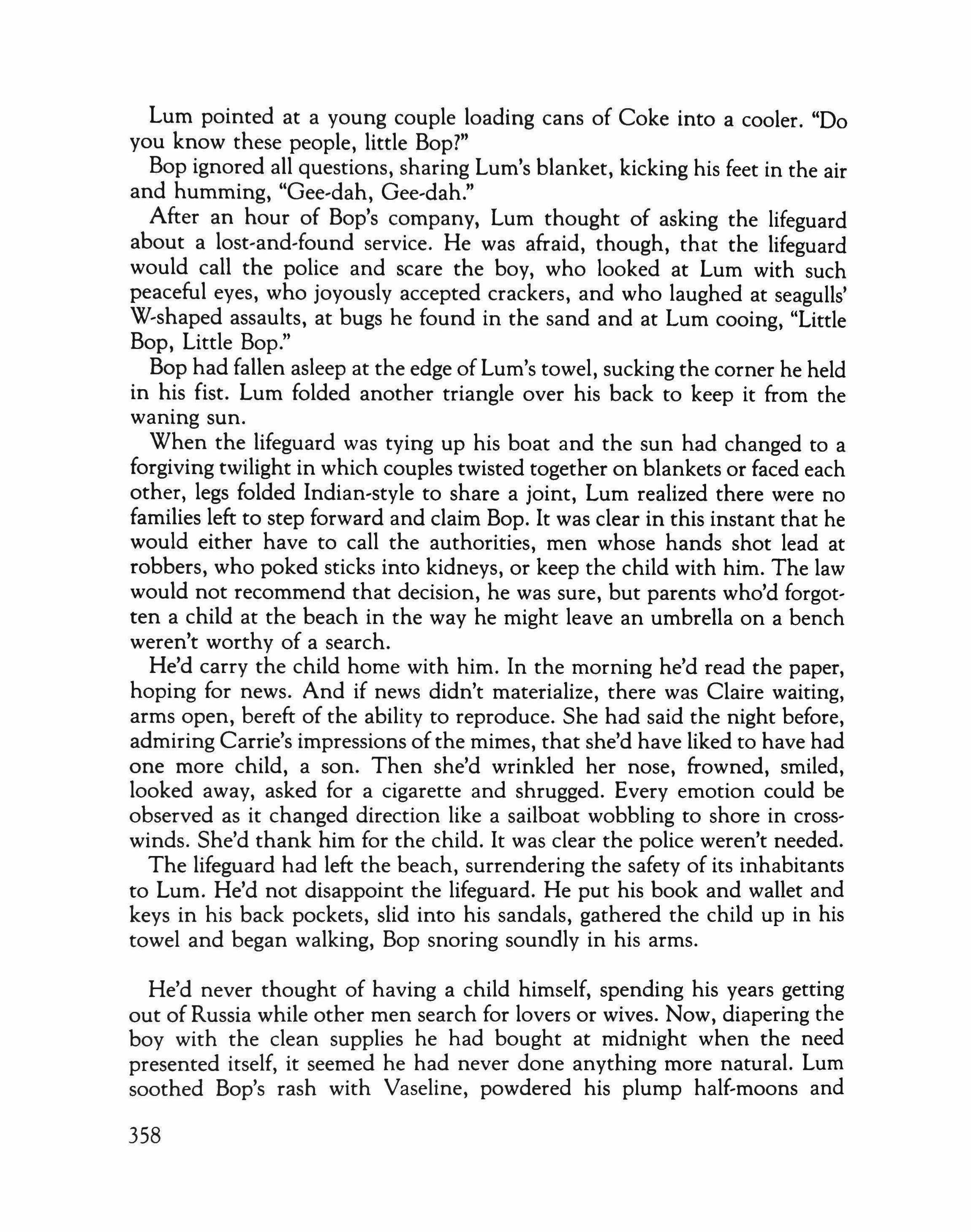
Lum pointed at a young couple loading cans of Coke into a cooler. "Do you know these people, little Bop?"
Bop ignored all questions, sharing Lum's blanket, kicking his feet in the air and humming, "Gee-dah, Gee-dah,"
After an hour of Bop's company, Lum thought of asking the lifeguard about a lost-and-found service. He was afraid, though, that the lifeguard would call the police and scare the boy, who looked at Lum with such peaceful eyes, who joyously accepted crackers, and who laughed at seagulls' W,shaped assaults, at bugs he found in the sand and at Lum cooing, "Little Bop, Little Bop."
Bop had fallen asleep at the edge of Lurn's towel, sucking the corner he held in his fist. Lum folded another triangle over his back to keep it from the waning sun.
When the lifeguard was tying up his boat and the sun had changed to a forgiving twilight in which couples twisted together on blankets or faced each other, legs folded Indian-stvle to share a joint, Lum realized there were no families left to step forward and claim Bop. It was clear in this instant that he would either have to call the authorities, men whose hands shot lead at robbers, who poked sticks into kidneys, or keep the child with him. The law would not recommend that decision, he was sure, but parents who'd forgot' ten a child at the beach in the way he might leave an umbrella on a bench weren't worthy of a search.
He'd carry the child home with him. In the morning he'd read the paper, hoping for news. And if news didn't materialize, there was Claire waiting, arms open, bereft of the ability to reproduce. She had said the night before, admiring Carrie's impressions ofthe mimes, that she'd have liked to have had one more child, a son. Then she'd wrinkled her nose, frowned, smiled, looked away, asked for a cigarette and shrugged. Every emotion could be observed as it changed direction like a sailboat wobbling to shore in cross' winds. She'd thank him for the child. It was clear the police weren't needed.
The lifeguard had left the beach, surrendering the safety of its inhabitants to Lum. He'd not disappoint the lifeguard. He put his book and wallet and keys in his back pockets, slid into his sandals, gathered the child up in his towel and began walking, Bop snoring soundly in his arms.
He'd never thought of having a child himself, spending his years getting out of Russia while other men search for lovers or wives. Now, diapering the boy with the clean supplies he had bought at midnight when the need presented itself, it seemed he had never done anything more natural. Lum soothed Bop's rash with Vaseline, powdered his plump half-moons and
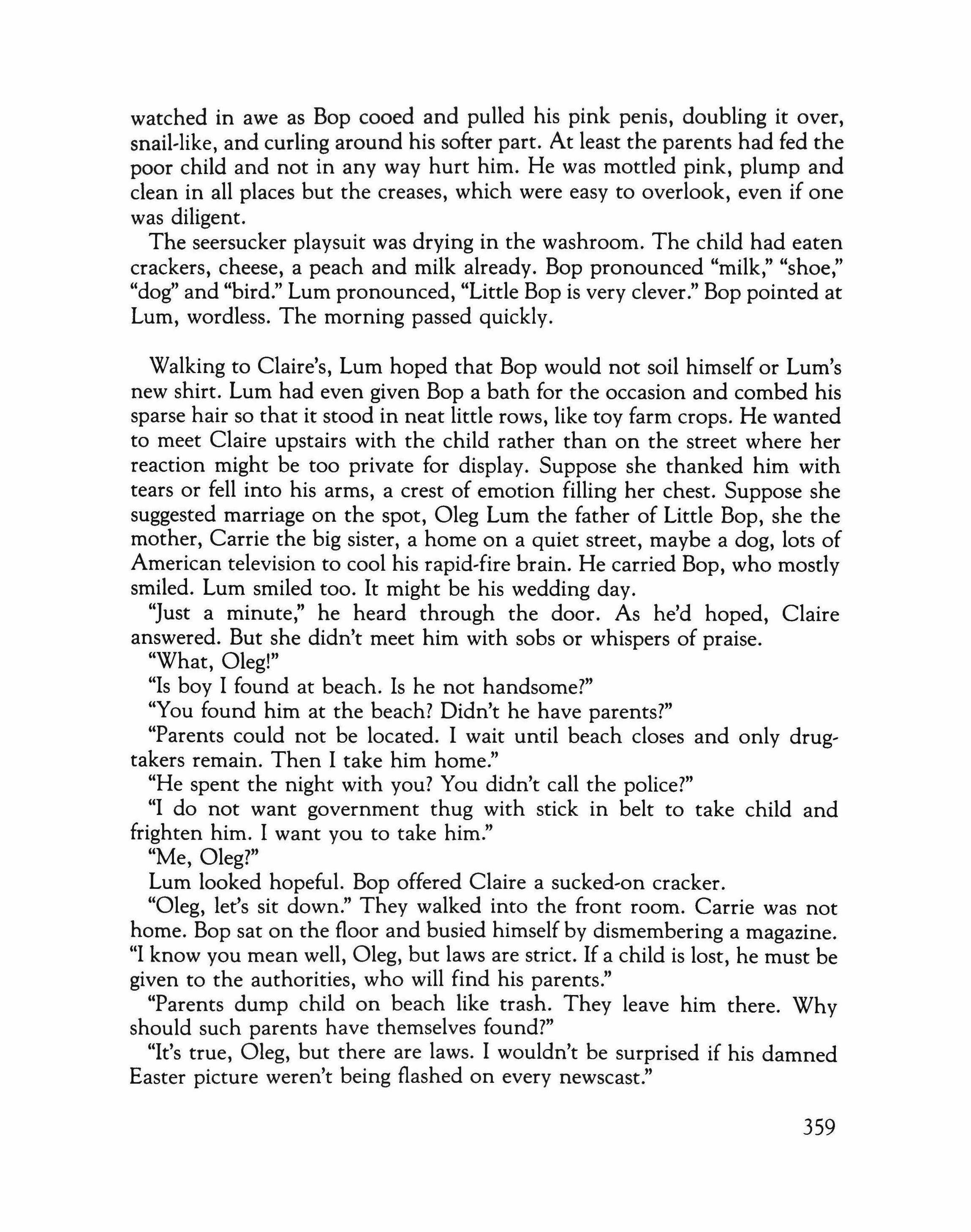
watched in awe as Bop cooed and pulled his pink penis, doubling it over, snail-like, and curling around his softer part. At least the parents had fed the poor child and not in any way hurt him. He was mottled pink, plump and clean in all places but the creases, which were easy to overlook, even if one was diligent.
The seersucker playsuit was drying in the washroom. The child had eaten crackers, cheese, a peach and milk already. Bop pronounced "milk," "shoe," "dog" and "bird." Lum pronounced, "Little Bop is very clever." Bop pointed at Lum, wordless. The morning passed quickly.
Walking to Claire's, Lum hoped that Bop would not soil himself or Lum's new shirt. Lum had even given Bop a bath for the occasion and combed his sparse hair so that it stood in neat little rows, like toy farm crops. He wanted to meet Claire upstairs with the child rather than on the street where her reaction might be too private for display. Suppose she thanked him with tears or fell into his arms, a crest of emotion filling her chest. Suppose she suggested marriage on the spot, Oleg Lum the father of Little Bop, she the mother, Carrie the big sister, a home on a quiet street, maybe a dog, lots of American television to cool his rapid-fire brain. He carried Bop, who mostly smiled. Lum smiled too. It might be his wedding day.
"Just a minute," he heard through the door. As he'd hoped, Claire answered. But she didn't meet him with sobs or whispers of praise.
"What, Oleg!"
"Is boy I found at beach. Is he not handsome?"
"You found him at the beach? Didn't he have parents?"
"Parents could not be located. I wait until beach closes and only drug, takers remain. Then I take him home."
"He spent the night with you? You didn't call the police?"
"I do not want government thug with stick in belt to take child and frighten him. I want you to take him."
"Me, Oleg?"
Lum looked hopeful. Bop offered Claire a sucked-on cracker.
"Oleg, let's sit down." They walked into the front room. Carrie was not home. Bop sat on the floor and busied himself by dismembering a magazine. "I know you mean well, Oleg, but laws are strict. If a child is lost, he must be given to the authorities, who will find his parents."
"Parents dump child on beach like trash. They leave him there. Why should such parents have themselves found?"
"It's true, Oleg, but there are laws. I wouldn't be surprised if his damned Easter picture weren't being flashed on every newscast."
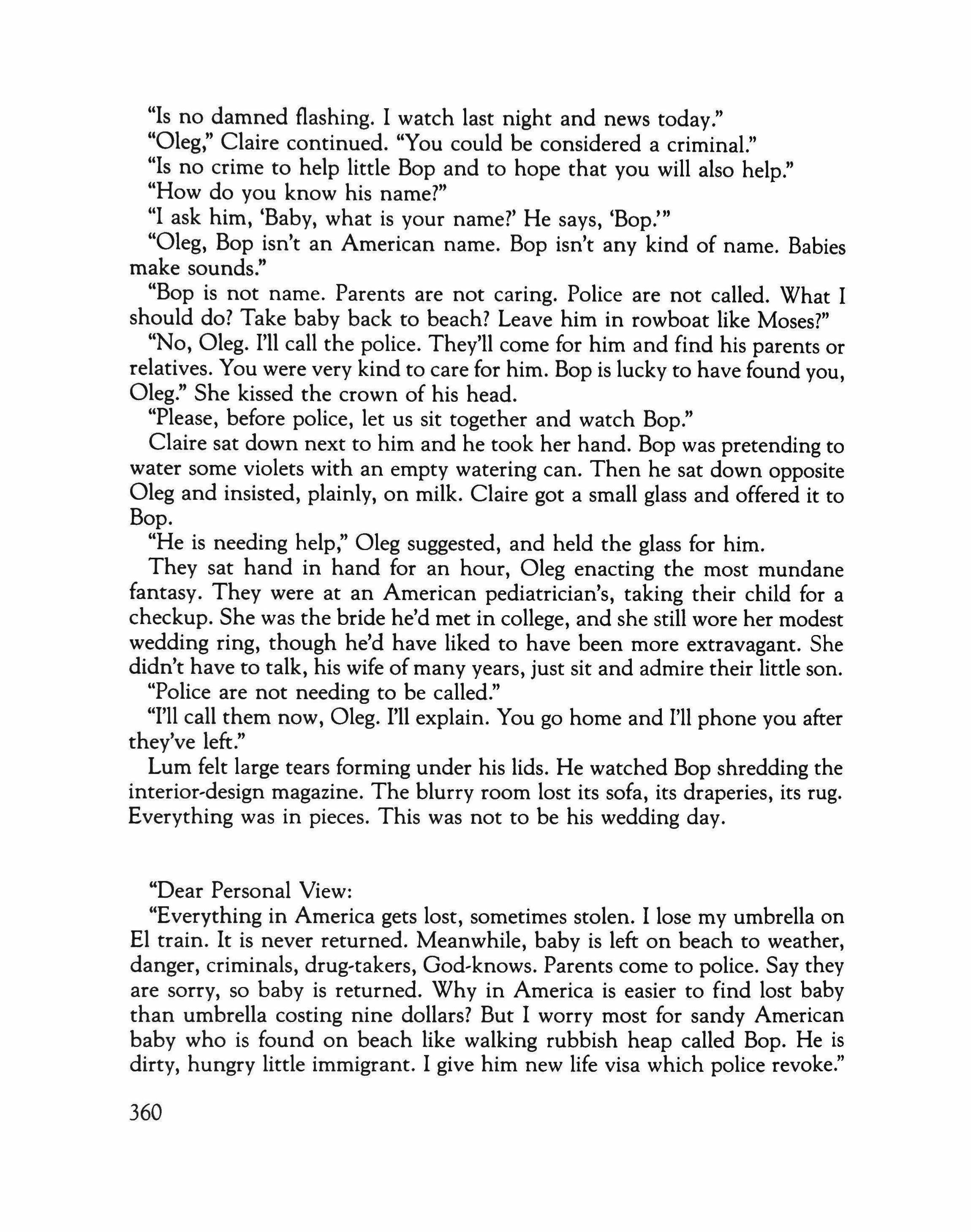
"Is no damned flashing. I watch last night and news today."
"Oleg," Claire continued. "You could be considered a criminal."
"Is no crime to help little Bop and to hope that you will also help."
"How do you know his name?"
"I ask him, 'Baby, what is your name?' He says, 'Bop.'"
"Oleg, Bop isn't an American name. Bop isn't any kind of name. Babies make sounds."
"Bop is not name. Parents are not caring. Police are not called. What I should do? Take baby back to beach? Leave him in rowboat like Moses?"
"No, Oleg. I'll call the police. They'll come for him and find his parents or relatives. You were very kind to care for him. Bop is lucky to have found you, Oleg." She kissed the crown of his head.
"Please, before police, let us sit together and watch Bop."
Claire sat down next to him and he took her hand. Bop was pretending to water some violets with an empty watering can. Then he sat down opposite Oleg and insisted, plainly, on milk. Claire got a small glass and offered it to Bop.
"He is needing help," Oleg suggested, and held the glass for him. They sat hand in hand for an hour, Oleg enacting the most mundane fantasy. They were at an American pediatrician's, taking their child for a checkup. She was the bride he'd met in college, and she still wore her modest wedding ring, though he'd have liked to have been more extravagant. She didn't have to talk, his wife of many years, just sit and admire their little son.
"Police are not needing to be called."
"I'll call them now, Oleg. I'll explain. You go home and I'll phone you after they've left."
Lum felt large tears forming under his lids. He watched Bop shredding the interior-design magazine. The blurry room lost its sofa, its draperies, its rug. Everything was in pieces. This was not to be his wedding day.
"Dear Personal View:
"Everything in America gets lost, sometimes stolen. I lose my umbrella on El train. It is never returned. Meanwhile, baby is left on beach to weather, danger, criminals, drug-rakers, God-knows, Parents come to police. Say they are sorry, so baby is returned. Why in America is easier to find lost baby than umbrella costing nine dollars? But I worry most for sandy American baby who is found on beach like walking rubbish heap called Bop. He is dirty, hungry little immigrant. I give him new life visa which police revoke." 360
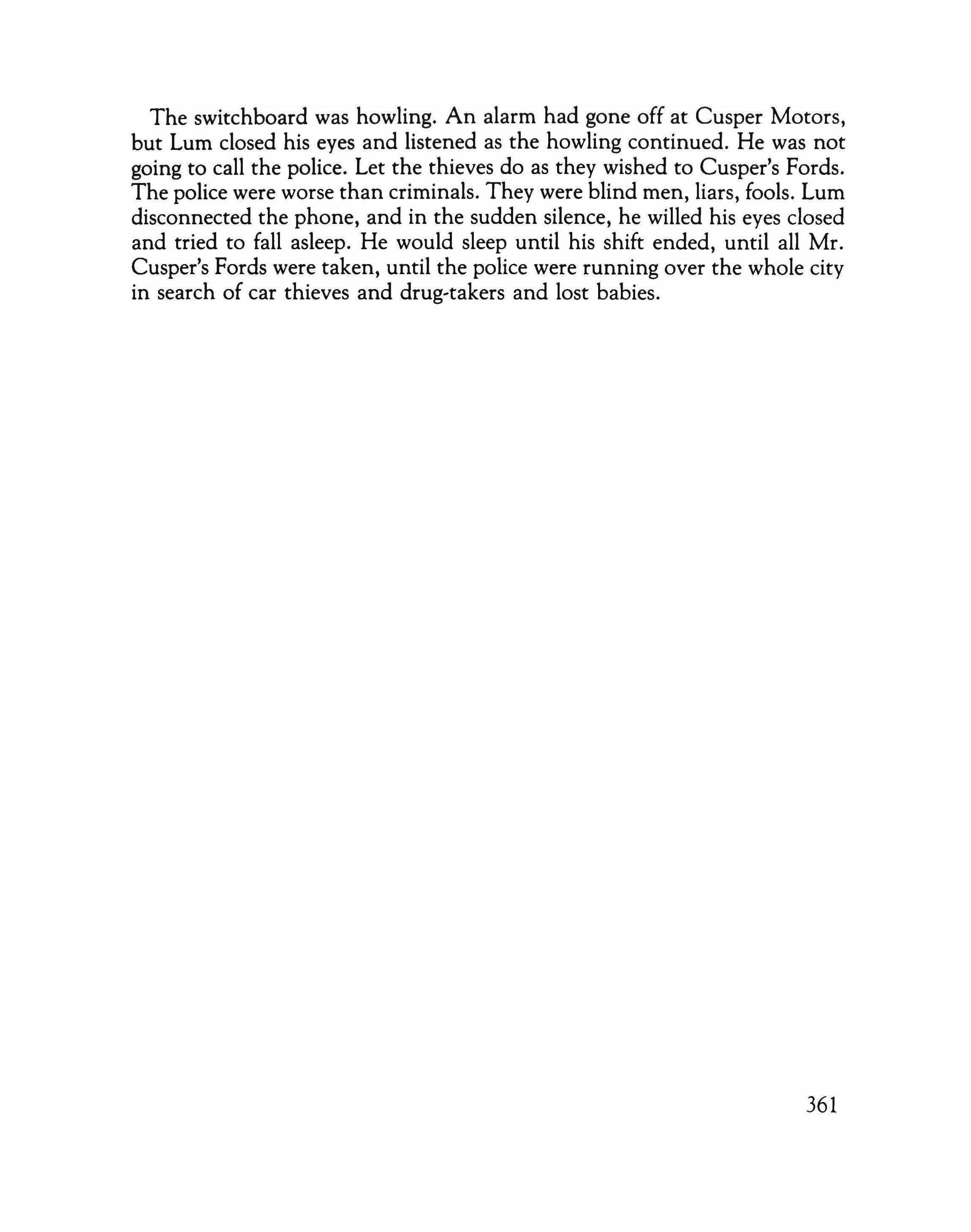
The switchboard was howling. An alarm had gone off at Cusper Motors, but Lum closed his eyes and listened as the howling continued. He was not going to call the police. Let the thieves do as they wished to Cusper's Fords. The police were worse than criminals. They were blind men, liars, fools. Lum disconnected the phone, and in the sudden silence, he willed his eyes closed and tried to fall asleep. He would sleep until his shift ended, until all Mr. Cusper's Fords were taken, until the police were running over the whole city in search of car thieves and drug-takers and lost babies.

Tonight: fog, steady drizzle, streetlights like funnels collecting rain. Down Farwell, the windows of the apartment building where Babowitz lived reflected across the wet tennis courts, and I wondered if I'd ever leave this city. When I reached the lake I ran tightroping along the surging line of the water's edge. My boots peeled flying clods of footprints from the sand. It was late, the hallways quiet, supper smoke still ringing the light bulbs. My dark room with its windows raised smelled of wet screens and tangerines.
Chicago, November

In summer, waiting for night, we'd pose against the afterglow on corners, watching traffic cruise through the neighborhood. Sometimes, a car would go by without its headlights on and we'd all yell, "Lights!"
"Lights!" we'd keep yelling until the beams flashed on. It was usually immediate-the driver honking back thanks, or flinching embarrassed behind the steering wheel, or gunning past, and we'd see his red taillights blink on.
But there were times-who knows why?-when drunk or high, stubborn, or simply lost in that glide to somewhere else, the driver just kept driving in the dark, and all down the block we'd hear yelling from doorways and storefronts, front steps, and other corners, voices winking on like fireflies: "Lights! Your lights! Hey, lights!"
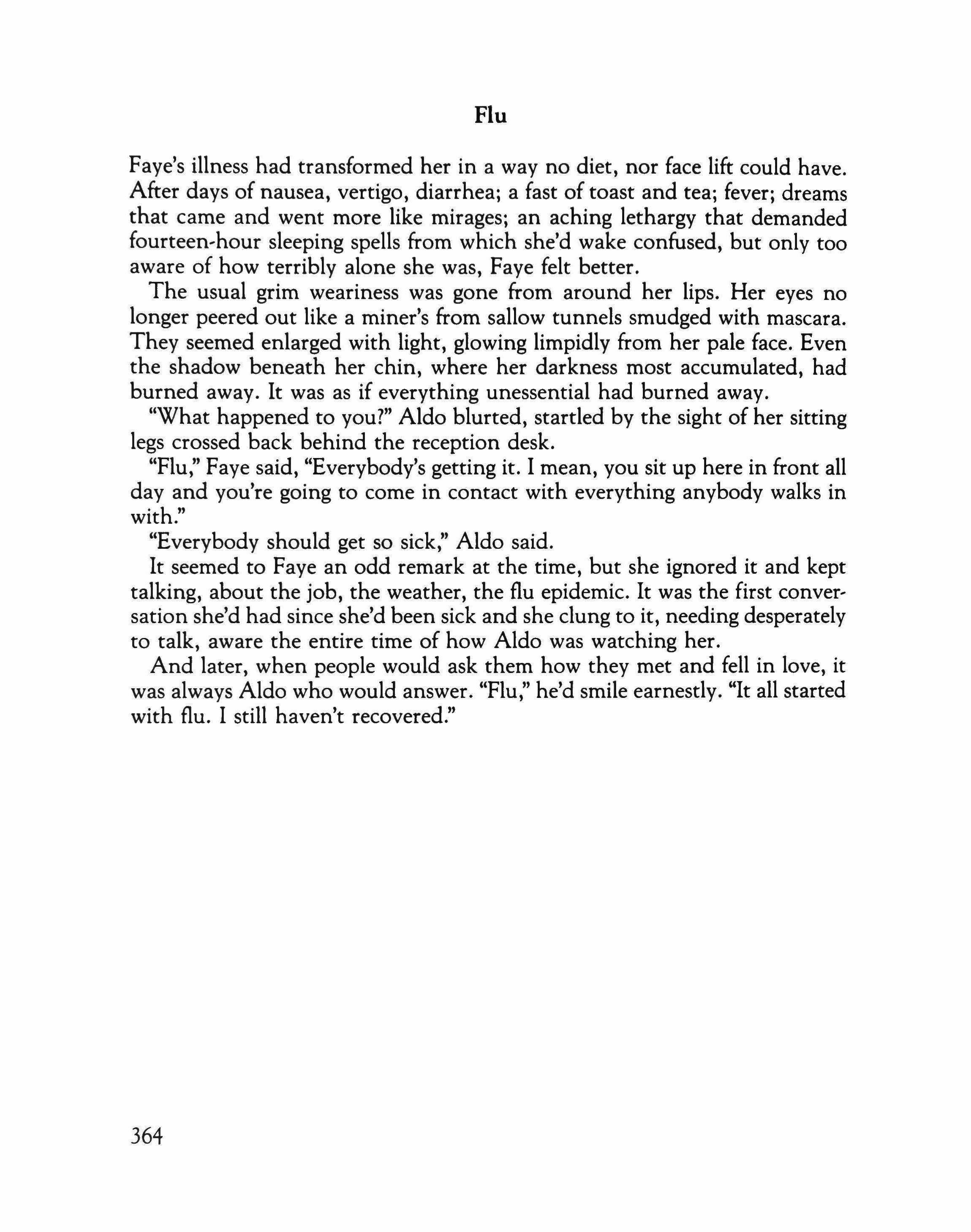
Faye's illness had transformed her in a way no diet, nor face lift could have. After days of nausea, vertigo, diarrhea; a fast of toast and tea; fever; dreams that came and went more like mirages; an aching lethargy that demanded fourteen-hour sleeping spells from which she'd wake confused, but only too aware of how terribly alone she was, Faye felt better.
The usual grim weariness was gone from around her lips. Her eyes no longer peered out like a miner's from sallow tunnels smudged with mascara. They seemed enlarged with light, glowing limpidly from her pale face. Even the shadow beneath her chin, where her darkness most accumulated, had burned away. It was as if everything unessential had burned away.
"What happened to you?" Aldo blurted, startled by the sight of her sitting legs crossed back behind the reception desk.
"Flu:' Faye said, "Everybody's getting it. I mean, you sit up here in front all day and you're going to come in contact with everything anybody walks in with."
"Everybody should get so sick," Aldo said.
It seemed to Faye an odd remark at the time, but she ignored it and kept talking, about the job, the weather, the flu epidemic. It was the first conversation she'd had since she'd been sick and she clung to it, needing desperately to talk, aware the entire time of how Aldo was watching her.
And later, when people would ask them how they met and fell in love, it was always Aldo who would answer. "Flu," he'd smile earnestly. "It all started with flu. I still haven't recovered."

Each day I'd collect caps from beer bottles. I'd go early in the morning through the alleys with a shopping bag, the way I'd seen old women and bums, picking through garbage in a cloud of flies. Collectors of all kinds thrived in the alleys: scrap collectors, deposit-bottle collectors, other people's hubcap collectors. I made my rounds, stopping behind taverns where corks spilled from splitting, soggy bags-clinking, shiny heaps, still sudded with beer, clotted with cigarette ashes from the night before.
I'd hose them down and store them in coffee cans. At the end of the week I'd line them in columns for contests between the brands. It was basically a three-way race between Pabst with its blue-ribboned cork, Bud, and Schlitz. Blatz and Miller's weren't far behind.
That got boring fast. It was the rare and exotics I continued to collect forEdelweiss; Yusay Pilsner; Carling's Black Label, with its matching black cap; Monarch, from the brewery down the street, its gold caps like pieces ofeight; and Meister Brau Bock, my favorite, each cap a stag's-head medallion.
By July I had too many to count. The coffee cans stashed in the basement began to smell- a metallic, fermenting malt. I worried my mother would find out. It would look to her like I was brewing polio. Still, the more I collected, the more beautiful and intricate corks became. Some were lined with plastic, some with foil. I noticed only the foreign corks actually contained cork. I tapped the dents from those too badly mangled by openers. When friends asked for bottle-caps to decorate the spokes on their bikes, I refused.
One afternoon I caught my younger brother in the basement, stuffing my corks into his pocket.
"What do you think you're doing?" I demanded.
At first he wouldn't talk, but I had him by the T,shirt, which I worked up around his throat, slowly twisting it to a knot at his windpipe.
He led me into the backyard, to a sunless patch behind the oil shed, and pointed. Everywhere I looked I could see my corks half buried, jagged edges sticking up among clothespin crosses and pieces of colored glass.
"I've been using them as tombstones:' he said, "in my insect graveyard."

Her hands were always scratched from sparring with cats. I used to watch her out walking some mutt she said she'd found the same way she found men.
For years she'd open her house to whatever stray showed up. She never caged them, let them wander in and out of her life-dogs, cats, rabbits, birds
It seemed she was constantly nursing some kind of bird. Convalescent pigeons would return, roosting and cooing in the eaves above the doorstep where she sprinkled hard corn.
"The starlings never live," she said, "you can't cure a starling."
There would be saucers everywhere, some stained with milk, others brimming with dirty rainwater. She believed in the curative powers of rain.
"I never give any of them names. We don't know an animal's name. A name's what we use instead of smelling."
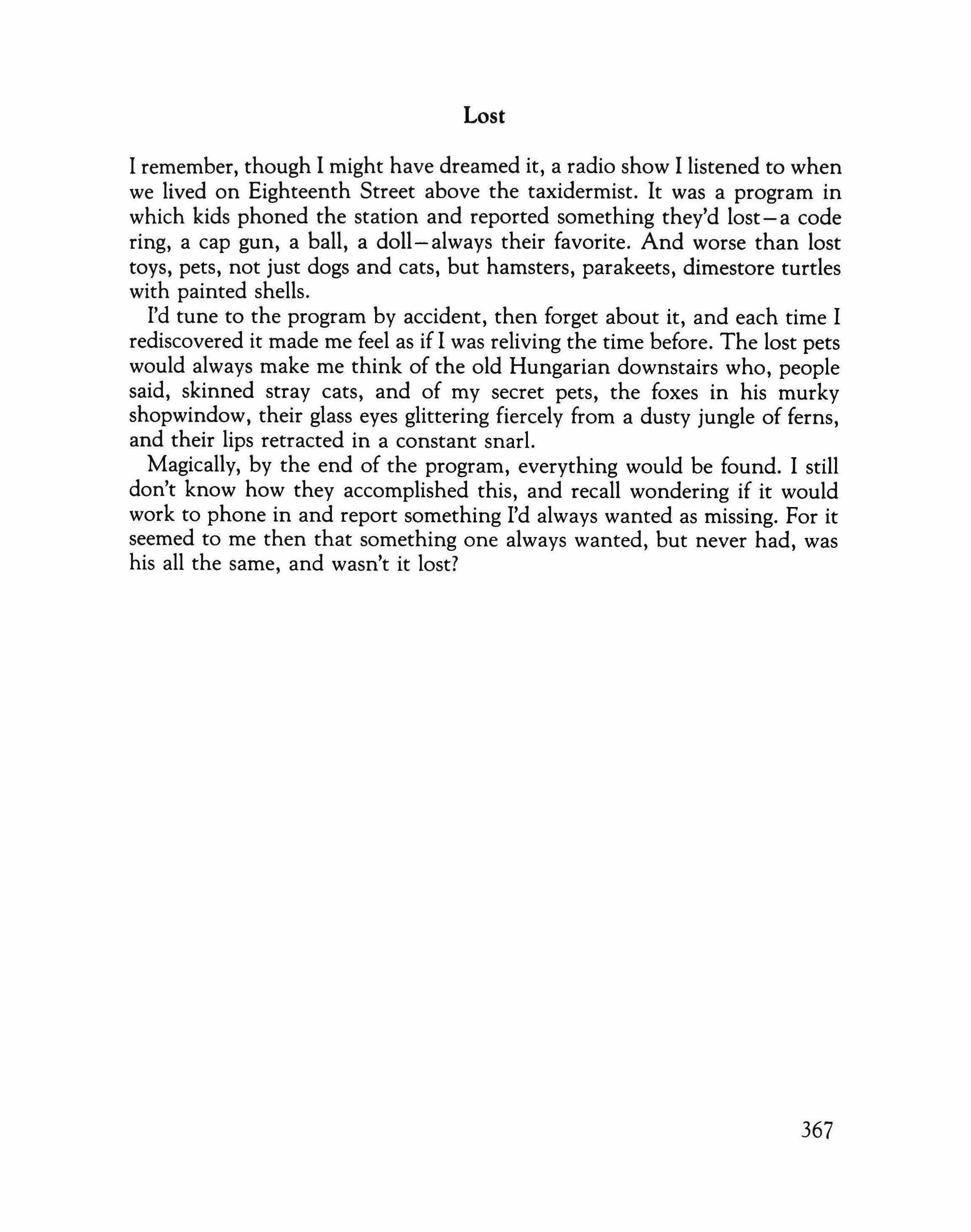
I remember, though I might have dreamed it, a radio show I listened to when we lived on Eighteenth Street above the taxidermist. It was a program in which kids phoned the station and reported something they'd lost-a code ring, a cap gun, a ball, a doll-always their favorite. And worse than lost toys, pets, not just dogs and cats, but hamsters, parakeets, dimestore turtles with painted shells.
I'd tune to the program by accident, then forget about it, and each time I rediscovered it made me feel as if I was reliving the time before. The lost pets would always make me think of the old Hungarian downstairs who, people said, skinned stray cats, and of my secret pets, the foxes in his murky shopwindow, their glass eyes glittering fiercely from a dusty jungle of ferns, and their lips retracted in a constant snarl.
Magically, by the end of the program, everything would be found. I still don't know how they accomplished this, and recall wondering if it would work to phone in and report something I'd always wanted as missing. For it seemed to me then that something one always wanted, but never had, was his all the same, and wasn't it lost?

There is a snap to the air, a sigh of relief, a giving up. Spring giving a tease. The cold has disappeared, for the day anyway.
Out on Clark Street the three transvestites are in front of the jewelry store hailing cars as they stop at the light. Leroy the wino, who once staggered drunk into our classroom, is waiting for victims by the bus stop. Whenever somebody gets on or off, Leroy pounces and asks for money. For a few confused seconds there is this small, ragged queue ofpeople with embarrassed expressions on their faces standing patiently to give him their change. One of the Diablos walks by and bumps me. "Watch it, pendejo," he says, but his eyes are looking past me, out into the day, at something not visible. The Diablos are the gang that goes to Alrgeld, the public high school eight blocks west.
Clark Street is always something. The opposite of that snooty Perkins School that cages me up every day. "You are expected to remember you are Perkins students," Mrs. Mayberry is always going on. "You are in ninth grade, you are young ladies and gentlemen." Give me Clark Street anytime.
The other day this fat man got into an argument with one of the hookers who always stay in front ofthe pet shop. All of a sudden she pulls a knife and slashes at his face. The woman runs around the corner, the fat man stands there, blood running down his face and crying. The Perkins gym class is clumped around the wire fence that separates the soccer field from the street, watching like ravenous Cambodian children locked inside a compound. The fat man is standing right in front of the spot where the St. Valentine's Day massacre took place.
Cleopatra Searcy comes down the street walking into the sun, hand held over her eyes to shade them from the light. I wave, she waves back. Words go

racing through my mind but they are all fake, all wrong. I love you so. You're so beautiful. Phony bourgeois words that don't mean anything.
The brightness ofthe morning falls over her like a curtain, highlighting the skin. I wish the morning would last forever, the day stop right there; more useless phony words. Her skin is the color ofcafe au lait. The year we lived in Paris, Mel and Irene and me, we had eggs and cafe au lait at a sidewalk restaurant every morning. I was twelve then. We were in Paris because Mel's company was opening a branch. "Enjoy it while you can:' Irene said. "It's milk and corn flakes when we get back again. This is just time out."
We stay on Clark Street heading north, past the Humphrey Yogurt, over to the Reebie Storage. The Reebie has a statue ofIbis and Isis on either side of its door. It is a national landmark. I reach into my book bag and pull out a can of magnetic blue spray. I look over to where Cleopatra is standing in front ofthe Isis. Then I turn to the Ibis. Across the chest is sprayed DIABLO LOVE-LUIS MARIA VICmRJUANITA. I point the can below it, at the stomach, and spray RED SUNSET IN THE WEST - RILKE.
Next to the Reebie is the National Food. Just below the special of the week, canned peas half price, is DIABLOS RUN IT, DIG IT OR YOU RUN. I watch Cleopatra move from the Isis over to the National window. She has this faraway look on her face; the Isis has not been touched. She reaches into her book bag and takes out a spray can. In burnt-orange spray she writes WOMEN CAN HAVE MULTIPLE ORGASMS-CIRCE, her arm rising and falling as she moves along the window. I come over next to her and write EL SALVADOR-RILKE. The window is gorgeous, the burnt orange and the magnetic blue leap right out at you.
Cleopatra is thirsty, so we stop off at the deli. At lunchtime it is filled with Perkins brats but today we are ahead of everyone. I order coffee and Cleo, patra has an egg cream. The waitress is new and has never heard of egg creams. "You want eggs with whipped cream?" she says.
"You make a chocolate phosphate and you add a little milk," Cleopatra says.
"It's the way they make it in New York," I say.
"What would they want to do that for," the waitress says, "put milk in a phosphate?"
"To lighten it," Cleopatra says. There is a tiny edge in her voice. The waitress looks at her for a second and then shrugs.
"What should we do today?" I say. Cleopatra looks without saying any, thing. "We could go to my house," I say.
"What about Irene?" she says. Everybody calls her that. "I'm a person," she tells them, "not just Keith Cooper's mother." Mel took a different tack. "It's
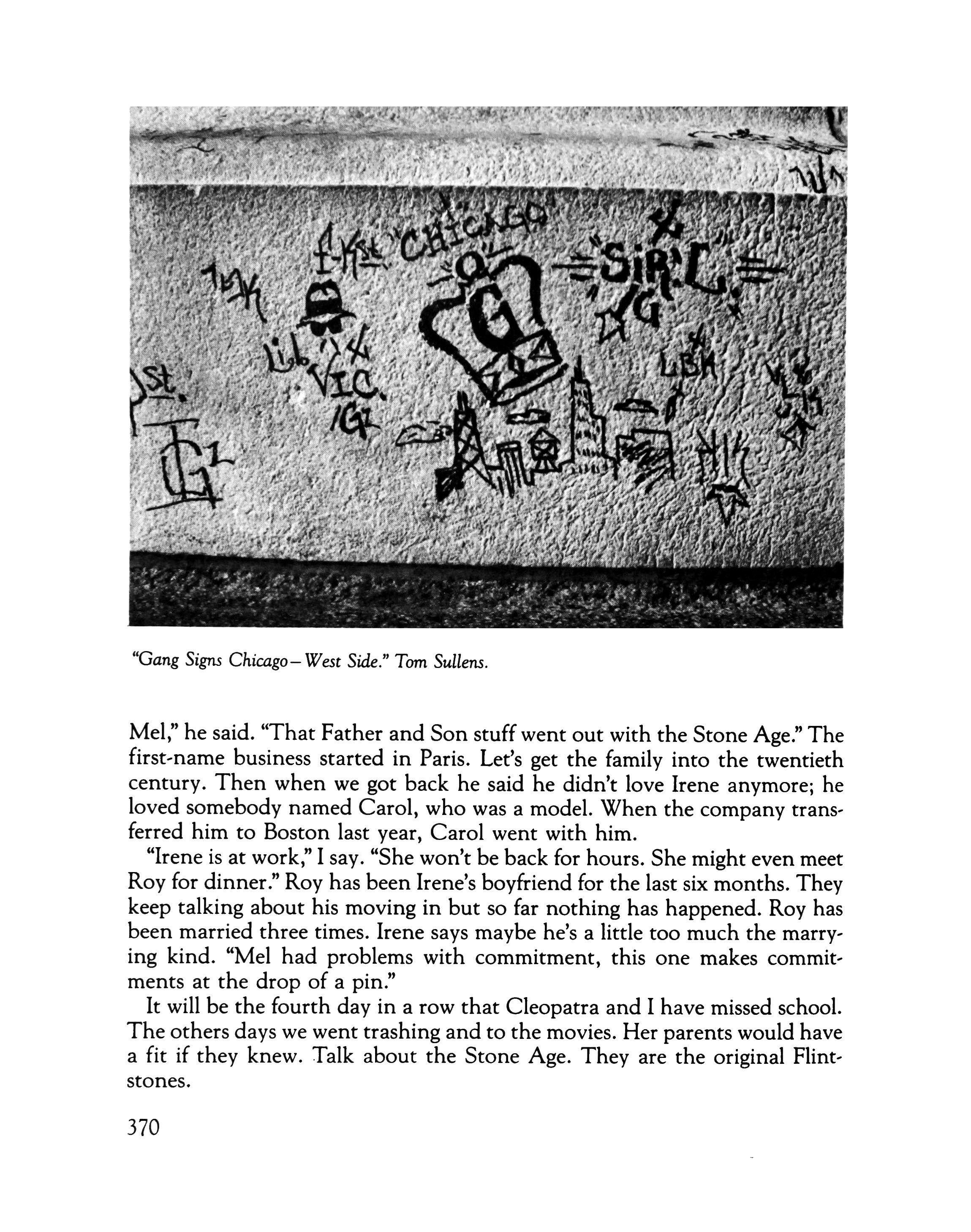
Mel," he said. "That Father and Son stuff went out with the Stone Age." The first-name business started in Paris. Let's get the family into the twentieth century. Then when we got back he said he didn't love Irene anymore; he loved somebody named Carol, who was a model. When the company transferred him to Boston last year, Carol went with him.
"Irene is at work," I say. "She won't be back for hours. She might even meet Roy for dinner." Roy has been Irene's boyfriend for the last six months. They keep talking about his moving in but so far nothing has happened. Roy has been married three times. Irene says maybe he's a little too much the marrving kind. "Mel had problems with commitment, this one makes commitments at the drop of a pin."
It will be the fourth day in a row that Cleopatra and I have missed school. The others days we went trashing and to the movies. Her parents would have a fit if they knew. Talk about the Stone Age. They are the original Flintstones.
"Gang Signs Chicago- West Side." Tom Sullens.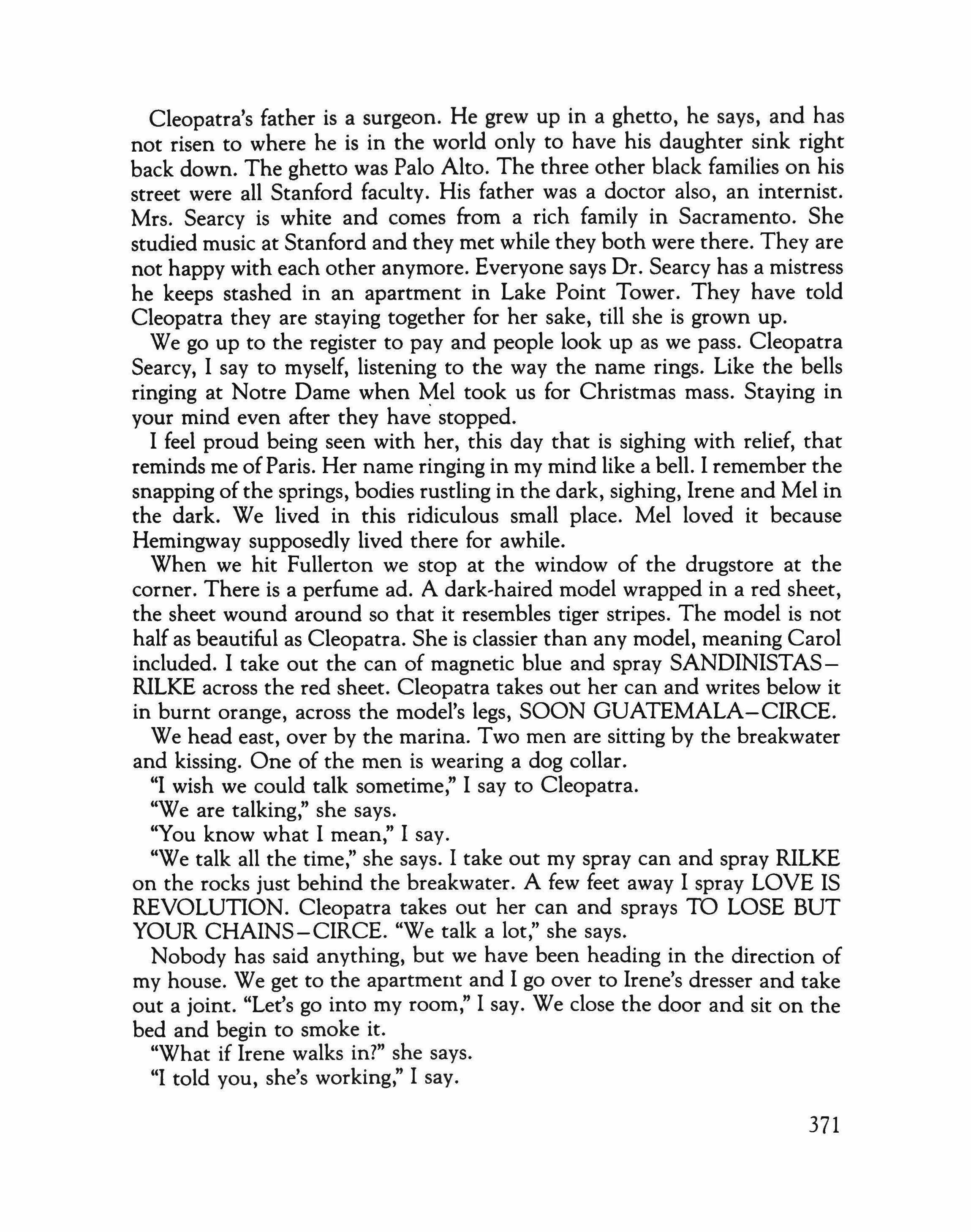
Cleopatra's father is a surgeon. He grew up in a ghetto, he says, and has not risen to where he is in the world only to have his daughter sink right back down. The ghetto was Palo Alto. The three other black families on his street were all Stanford faculty. His father was a doctor also, an internist. Mrs. Searcy is white and comes from a rich family in Sacramento. She studied music at Stanford and they met while they both were there. They are not happy with each other anymore. Everyone says Dr. Searcy has a mistress he keeps stashed in an apartment in Lake Point Tower. They have told Cleopatra they are staying together for her sake, till she is grown up.
We go up to the register to pay and people look up as we pass. Cleopatra Searcy, I say to myself, listening to the way the name rings. Like the bells ringing at Notre Dame when Mel took us for Christmas mass. Staying in your mind even after they have stopped.
I feel proud being seen with her, this day that is sighing with relief, that reminds me of Paris. Her name ringing in my mind like a bell. I remember the snapping ofthe springs, bodies rustling in the dark, sighing, Irene and Mel in the dark. We lived in this ridiculous small place. Mel loved it because Hemingway supposedly lived there for awhile.
When we hit Fullerton we stop at the window of the drugstore at the corner. There is a perfume ad. A dark,haired model wrapped in a red sheet, the sheet wound around so that it resembles tiger stripes. The model is not half as beautiful as Cleopatra. She is classier than any model, meaning Carol included. I take out the can of magnetic blue and spray SANDINISTASRILKE across the red sheet. Cleopatra takes out her can and writes below it in burnt orange, across the model's legs, SOON GUATEMALA-CIRCE.
We head east, over by the marina. Two men are sitting by the breakwater and kissing. One of the men is wearing a dog collar.
"I wish we could talk sometime," I say to Cleopatra.
"We are talking," she says.
"You know what I mean:' I say.
"We talk all the time," she says. I take out my spray can and spray RILKE on the rocks just behind the breakwater. A few feet away I spray LOVE IS REVOLUTION. Cleopatra takes out her can and sprays m LOSE BUT YOUR CHAINS-CIRCE. "We talk a lot," she says.
Nobody has said anything, but we have been heading in the direction of my house. We get to the apartment and I go over to Irene's dresser and take out a joint. "Let's go into my room," I say. We close the door and sit on the bed and begin to smoke it.
"What if Irene walks in?" she says.
"I told you, she's working," I say.
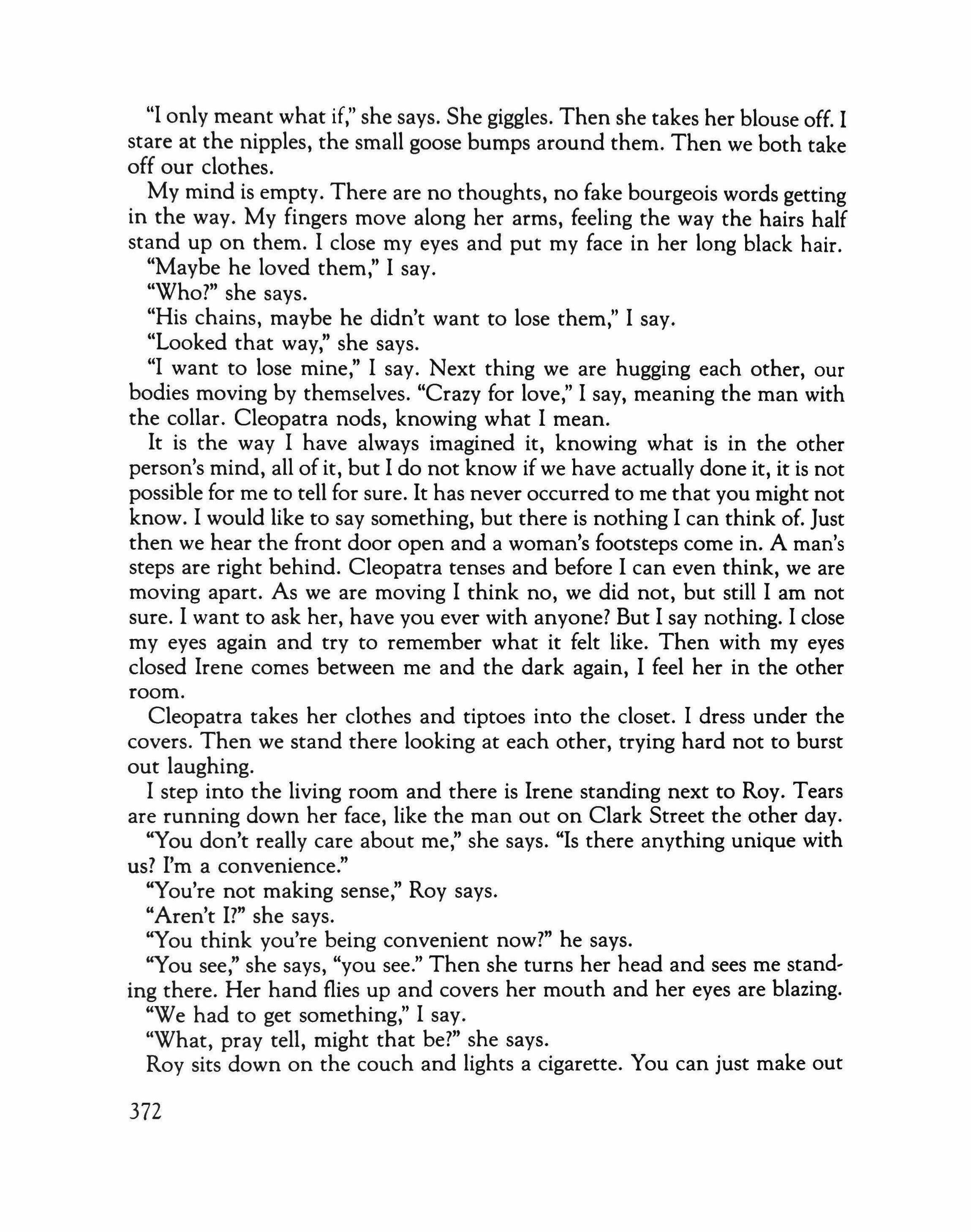
"I only meant what if," she says. She giggles. Then she takes her blouse off. I stare at the nipples, the small goose bumps around them. Then we both take off our clothes.
My mind is empty. There are no thoughts, no fake bourgeois words getting in the way. My fingers move along her arms, feeling the way the hairs half stand up on them. I close my eyes and put my face in her long black hair.
"Maybe he loved them," I say.
"Who?" she says.
"His chains, maybe he didn't want to lose them," I say.
"Looked that way," she says.
"I want to lose mine," I say. Next thing we are hugging each other, our bodies moving by themselves. "Crazy for love," I say, meaning the man with the collar. Cleopatra nods, knowing what I mean.
It is the way I have always imagined it, knowing what is in the other person's mind, all of it, but I do not know if we have actually done it, it is not possible for me to tell for sure. It has never occurred to me that you might not know. I would like to say something, but there is nothing I can think of. Just then we hear the front door open and a woman's footsteps corne in. A man's steps are right behind. Cleopatra tenses and before I can even think, we are moving apart. As we are moving I think no, we did not, but still I am not sure. I want to ask her, have you ever with anyone? But I say nothing. I close my eyes again and try to remember what it felt like. Then with my eyes closed Irene comes between me and the dark again, I feel her in the other room.
Cleopatra takes her clothes and tiptoes into the closet. I dress under the covers. Then we stand there looking at each other, trying hard not to burst out laughing.
I step into the living room and there is Irene standing next to Roy. Tears are running down her face, like the man out on Clark Street the other day.
"You don't really care about me," she says. "Is there anything unique with us? I'm a convenience."
"You're not making sense," Roy says.
"Aren't I?" she says.
"You think you're being convenient now?" he says.
"You see," she says, "you see." Then she turns her head and sees me stand, ing there. Her hand flies up and covers her mouth and her eyes are blazing.
"We had to get something," I say.
"What, pray tell, might that be?" she says.
Roy sits down on the couch and lights a cigarette. You can just make out
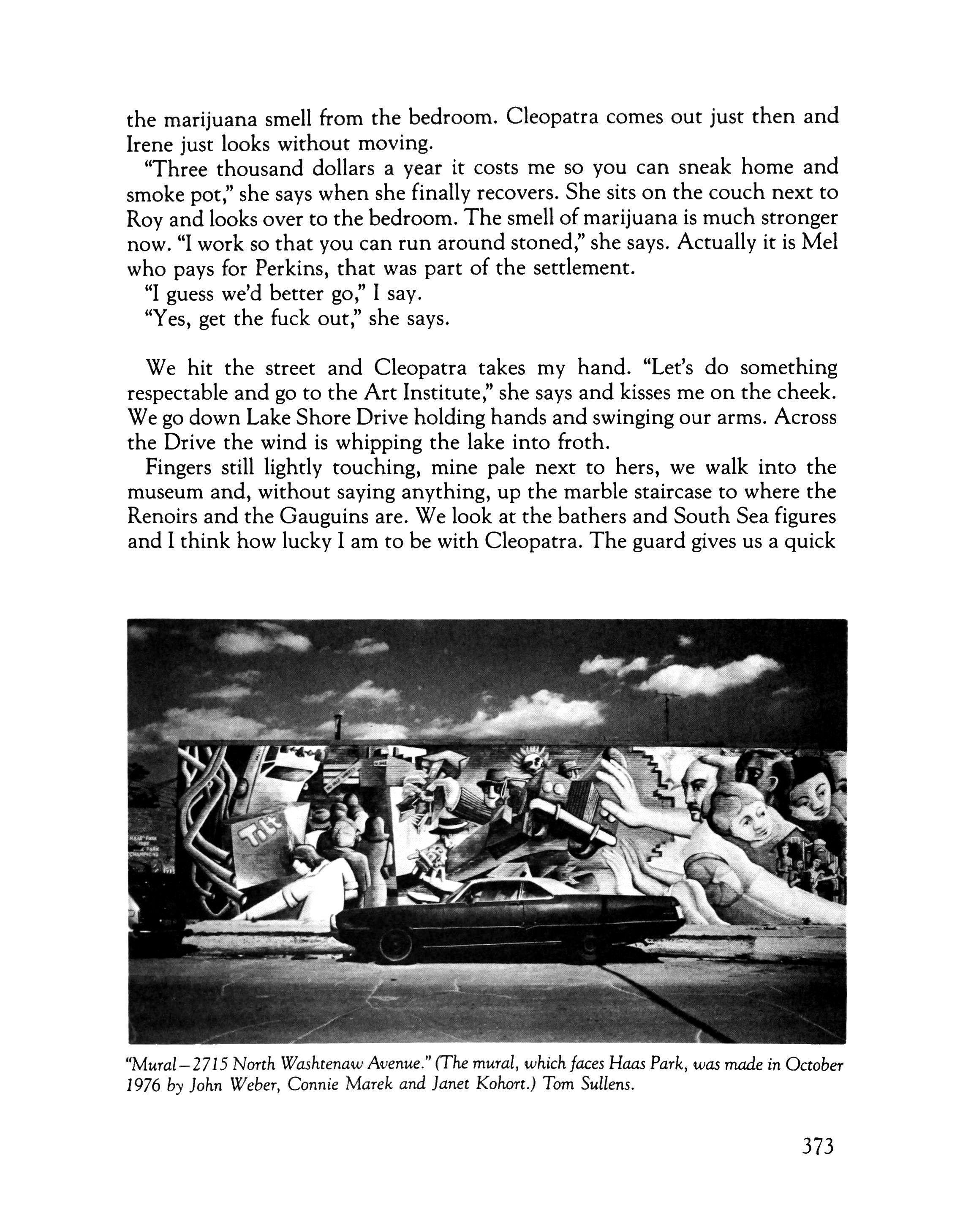
the marijuana smell from the bedroom. Cleopatra comes out just then and Irene just looks without moving.
"Three thousand dollars a year it costs me so you can sneak home and smoke pot:' she says when she finally recovers. She sits on the couch next to Roy and looks over to the bedroom. The smell of marijuana is much stronger now. "I work so that you can run around stoned," she says. Actually it is Mel who pays for Perkins, that was part of the settlement.
"I guess we'd better go:' I say.
"Yes, get the fuck out," she says.
We hit the street and Cleopatra takes my hand. "Let's do something respectable and go to the Art Institute," she says and kisses me on the cheek. We go down Lake Shore Drive holding hands and swinging our arms. Across the Drive the wind is whipping the lake into froth.
Fingers still lightly touching, mine pale next to hers, we walk into the museum and, without saying anything, up the marble staircase to where the Renoirs and the Gauguins are. We look at the bathers and South Sea figures and I think how lucky I am to be with Cleopatra. The guard gives us a quick
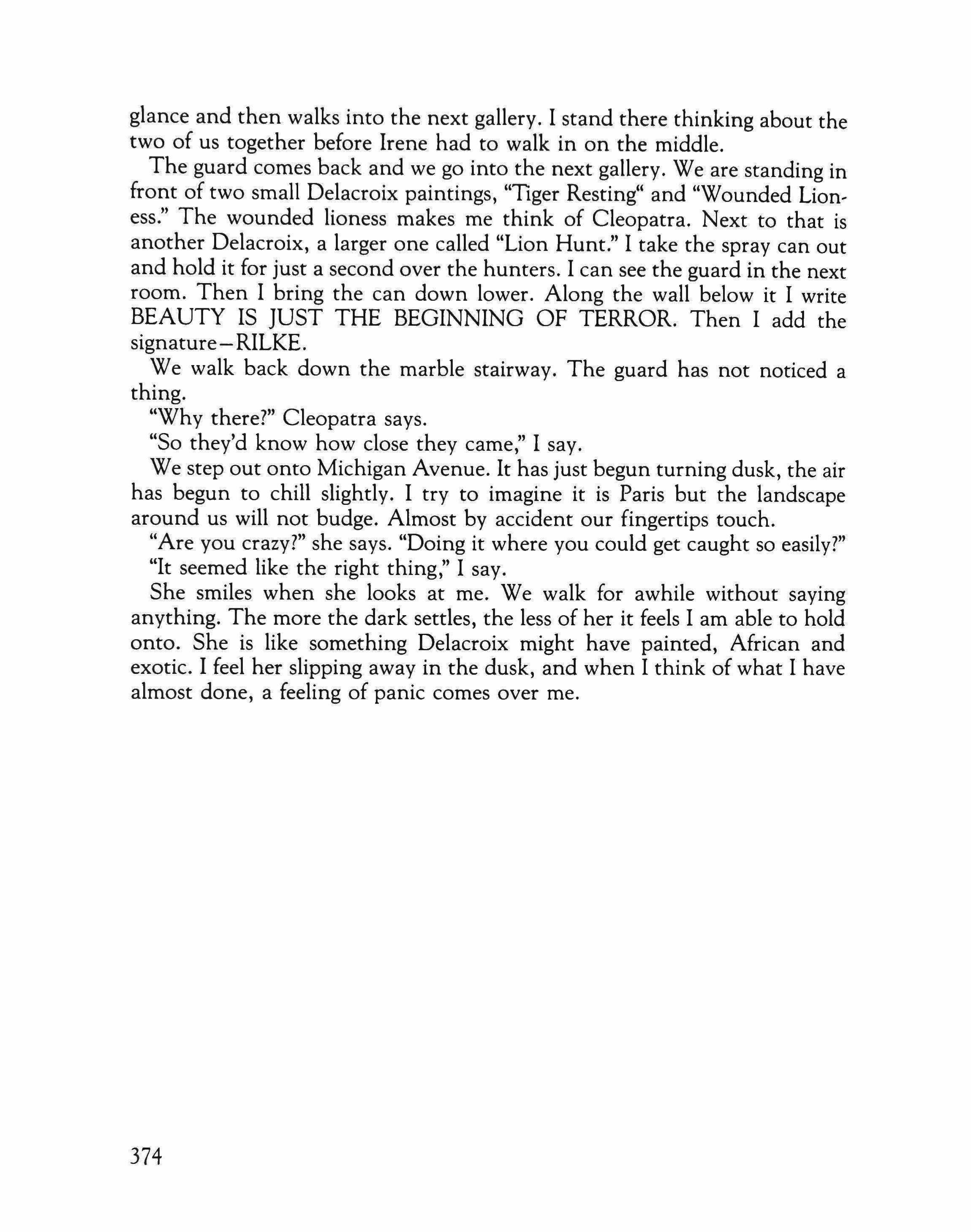
glance and then walks into the next gallery. I stand there thinking about the two of us together before Irene had to walk in on the middle.
The guard comes back and we go into the next gallery. We are standing in front of two small Delacroix paintings, "Tiger Resting" and "Wounded Lion, ess," The wounded lioness makes me think of Cleopatra. Next to that is another Delacroix, a larger one called "Lion Hunt." I take the spray can out and hold it for just a second over the hunters. I can see the guard in the next room. Then I bring the can down lower. Along the wall below it I write BEAUTY IS JUST THE BEGINNING OF TERROR. Then I add the signature-RILKE.
We walk back down the marble stairway. The guard has not noticed a thing.
"Why there?" Cleopatra says.
"So they'd know how close they carne," I say.
We step out onto Michigan Avenue. It has just begun turning dusk, the air has begun to chill slightly. I try to imagine it is Paris but the landscape around us will not budge. Almost by accident our fingertips touch.
"Are you crazy?" she says. "Doing it where you could get caught so easily?"
"It seemed like the right thing," I say.
She smiles when she looks at me. We walk for awhile without saying anything. The more the dark settles, the less of her it feels I am able to hold onto. She is like something Delacroix might have painted, African and exotic. I feel her slipping away in the dusk, and when I think of what I have almost done, a feeling of panic comes over me.

On the summer grass, eyes closed, I hear somewhere behind me the ice-cream vendor's cry sounded but crimped by wind, or else absorbed by all that sand.
A woman says something to her man. "We knew it. It's always so unexpected Really feel it?" An airplane, humming. "The flowers were lovely, so sharp."
Children's voices, like glass rubbed, melt toward the breaking surf, meeting other vapors there. The rustle and clap of gulls' wings. The air salty in the breeze
chafing the boardwalk piers where we children fled the sun and its unwanted disclosures for that homely shade thick with smells of taffy and cypress.
It's Atlantic City, 1954. Looking up, I find the wild red dragon kite and follow its string
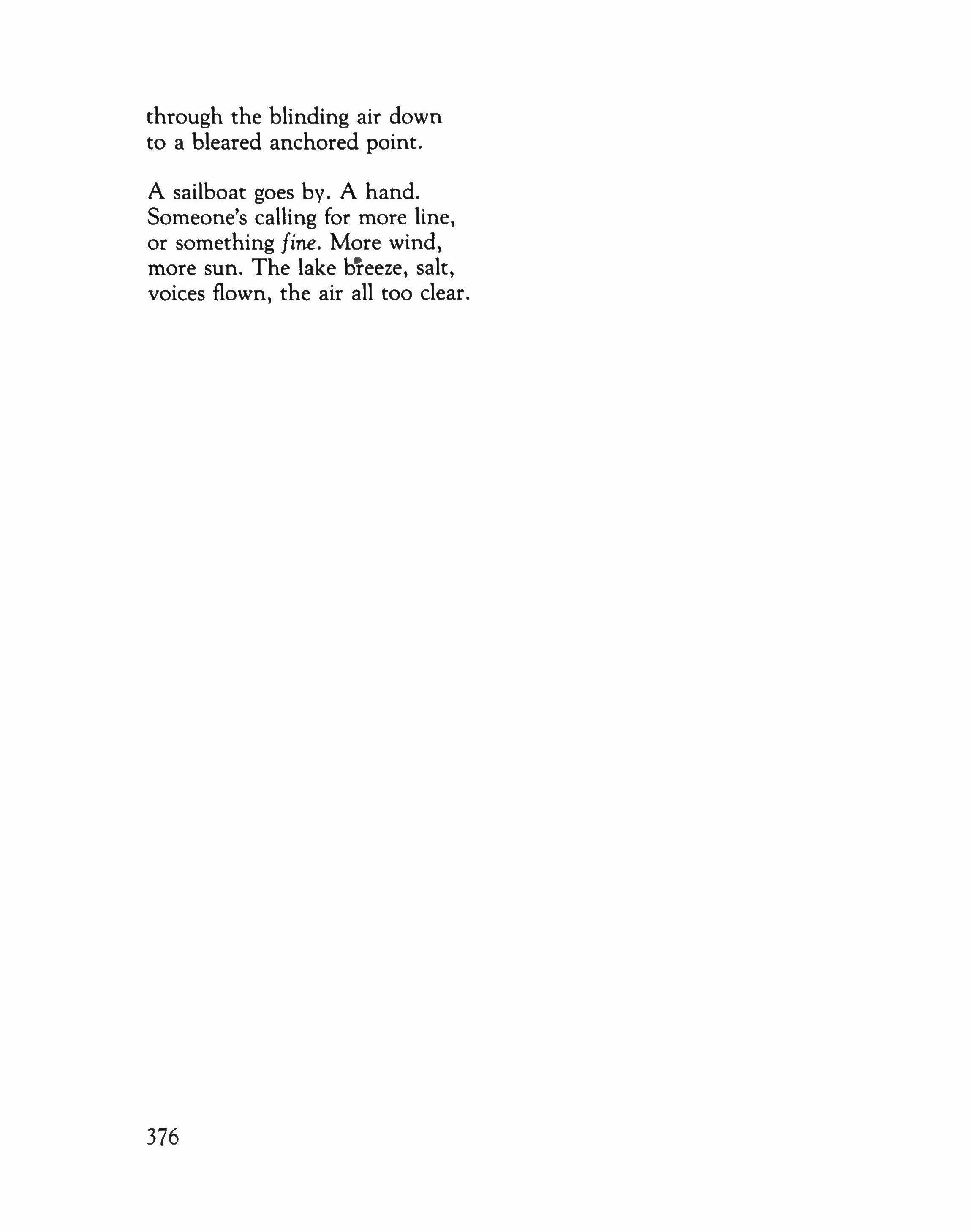
through the blinding air down to a bleared anchored point.
A sailboat goes by. A hand. Someone's calling for more line, or something fine. More wind, more sun. The lake b�eeze, salt, voices flown, the air all too clear.
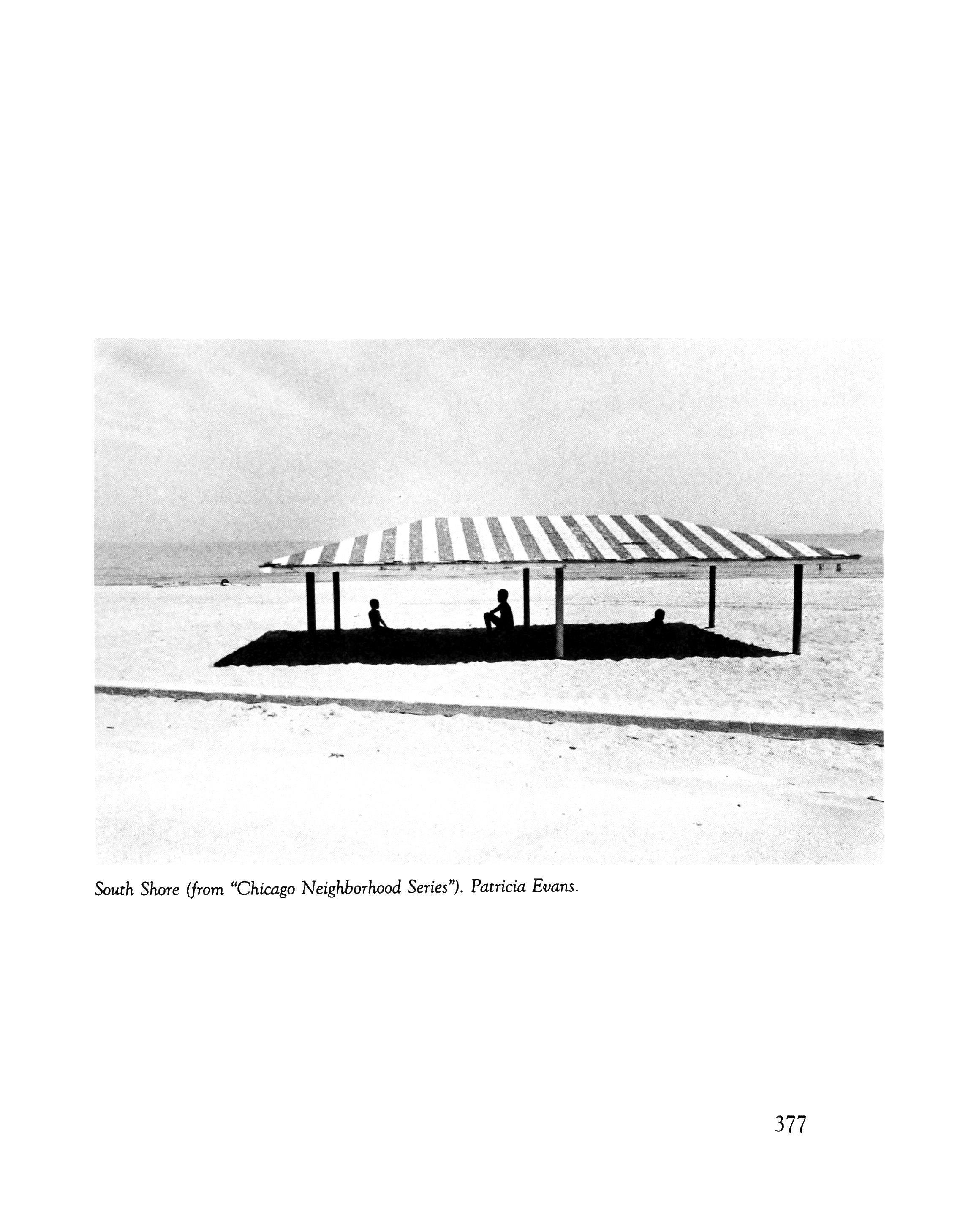

Like toads they've never seen, squat behind graystone stoops, or knotted in alleys, the children watch themselves disappear from his sight.
He exists in this hour only, in the black open-hatched truck, an occasion for their desire. They wait until he walks away,
watching the forms inside, blocks shaved and milky, winter's air tensed and saved for August, with something stellar at the center,
an aurora, a shattered core, December anger tossed off by frozen puddles bursting underfoot, mouths grinning up at them.
In a mountaintop town in the impossible Andes, parents tell their children that all song once began chanted by the Milky Way, but died out, froze into the ragged trail a summer sky someday would thaw, and heaven's music showers down again.
378

When he finally walks away, the vague blockhead solemn on his shoulder, they leap into the box and steal pieces of dogstar days.
Lunar needles, hatchetheads, sea horses, the air outside still gummed with tar fumes, a roof not yet cooked and poured.
Eating ice, ice, brittle echoes, boots breaking new snow, they walk easily away from the fear of being found.
How can they know the unseen ice man knows and loves them for their nerve?
That his bright remains always wait for them?
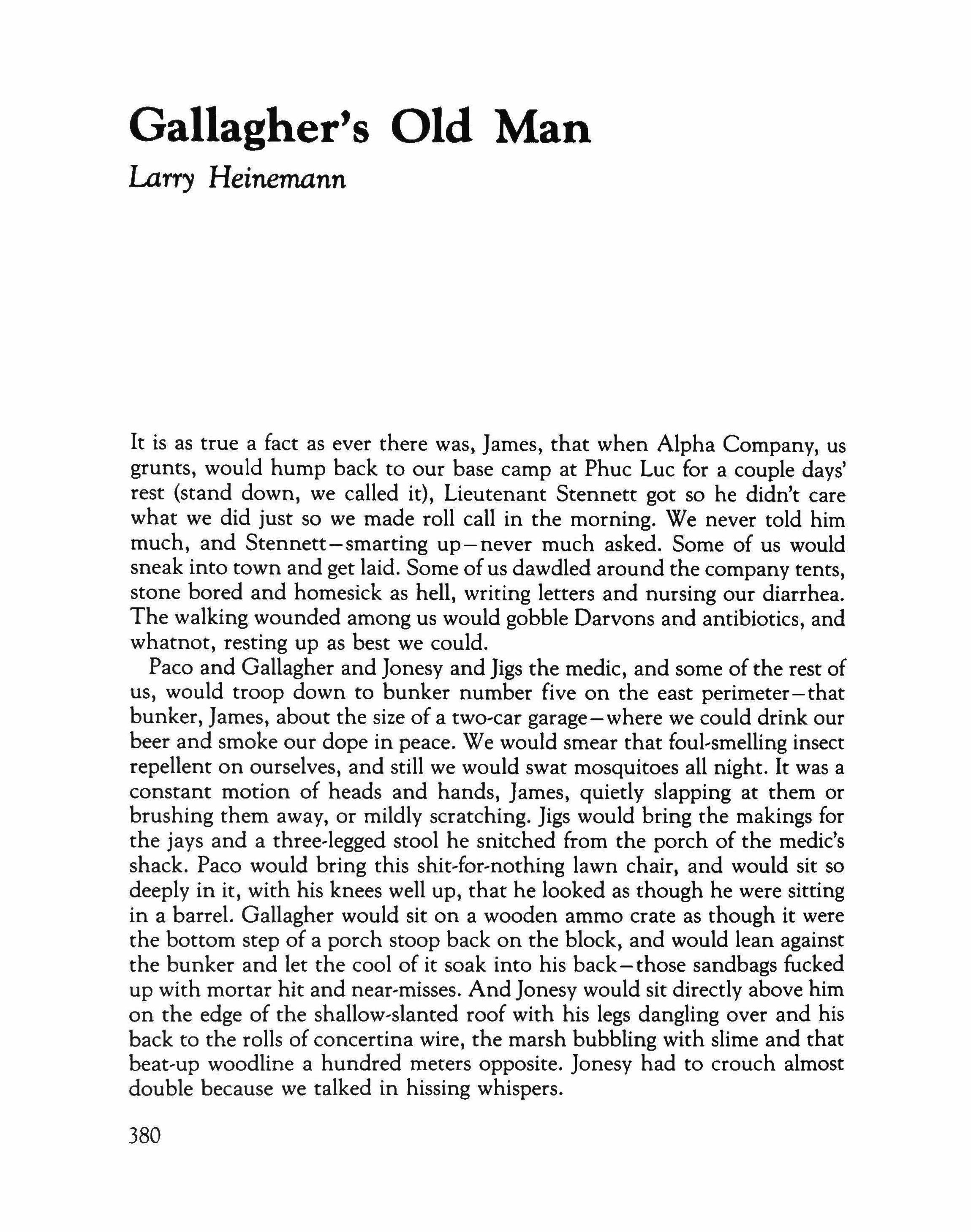
It is as true a fact as ever there was, James, that when Alpha Company, us grunts, would hump back to our base camp at Phuc Luc for a couple days' rest (stand down, we called it), Lieutenant Stennett got so he didn't care what we did just so we made roll call in the morning. We never told him much, and Stennett-smarting up-never much asked. Some of us would sneak into town and get laid. Some of us dawdled around the company tents, stone bored and homesick as hell, writing letters and nursing our diarrhea. The walking wounded among us would gobble Darvons and antibiotics, and whatnot, resting up as best we could.
Paco and Gallagher and Jonesy and Jigs the medic, and some of the rest of us, would troop down to bunker number five on the east perimeter-that bunker, James, about the size of a two-car garage-where we could drink our beer and smoke our dope in peace. We would smear that foul-smelling insect repellent on ourselves, and still we would swat mosquitoes all night. It was a constant motion of heads and hands, James, quietly slapping at them or brushing them away, or mildly scratching. Jigs would bring the makings for the jays and a three,legged stool he snitched from the porch of the medic's shack. Paco would bring this shit-for-nothing lawn chair, and would sit so deeply in it, with his knees well up, that he looked as though he were sitting in a barrel. Gallagher would sit on a wooden ammo crate as though it were the bottom step of a porch stoop back on the block, and would lean against the bunker and let the cool of it soak into his back-those sandbags fucked up with mortar hit and near-misses. And Jonesy would sit directly above him on the edge of the shallow-slanted roof with his legs dangling over and his back to the rolls of concertina wire, the marsh bubbling with slime and that beat-up woodline a hundred meters opposite. [onesy had to crouch almost double because we talked in hissing whispers.
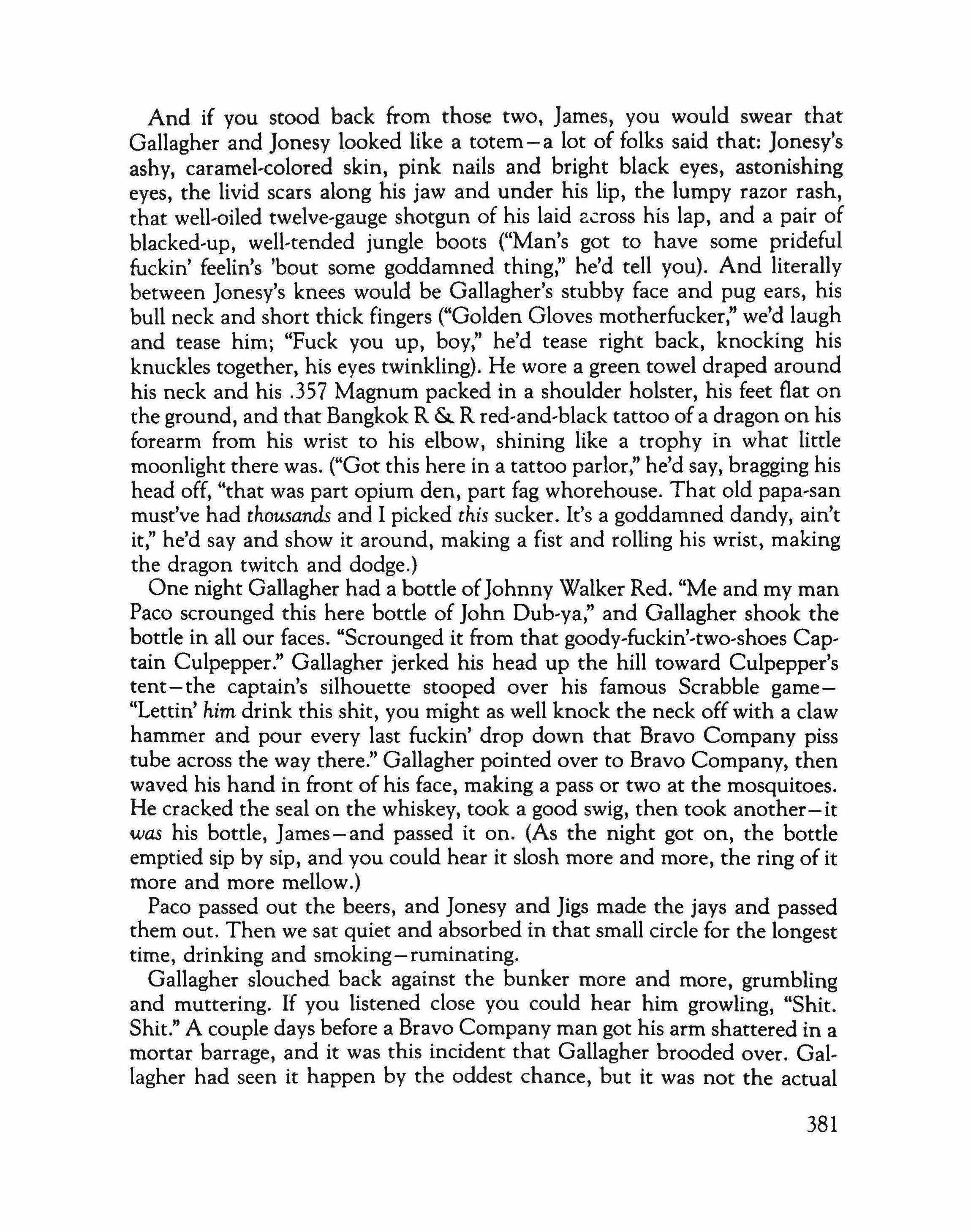
And if you stood back from those two, James, you would swear that Gallagher and Jonesy looked like a totem - a lot of folks said that: [onesv's ashy, caramel-colored skin, pink nails and bright black eyes, astonishing eyes, the livid scars along his jaw and under his lip, the lumpy razor rash, that well-oiled twelve-gauge shotgun of his laid across his lap, and a pair of blacked-up, well-tended jungle boots ("Man's got to have some prideful fuckin' feelin's 'bout some goddamned thing:' he'd tell you). And literally between [onesy's knees would be Gallagher's stubby face and pug ears, his bull neck and short thick fingers ("Golden Gloves motherfucker," we'd laugh and tease him; "Fuck you up, boy," he'd tease right back, knocking his knuckles together, his eyes twinkling). He wore a green towel draped around his neck and his .357 Magnum packed in a shoulder holster, his feet flat on the ground, and that Bangkok R & R red-and-black tattoo of a dragon on his forearm from his wrist to his elbow, shining like a trophy in what little moonlight there was. ("Got this here in a tattoo parlor," he'd say, bragging his head off, "that was part opium den, part fag whorehouse. That old papa-san must've had thousands and I picked this sucker. It's a goddamned dandy, ain't it:' he'd say and show it around, making a fist and rolling his wrist, making the dragon twitch and dodge.)
One night Gallagher had a bottle ofJohnny Walker Red. "Me and my man Paco scrounged this here bottle of John Dub-va," and Gallagher shook the bottle in all our faces. "Scrounged it from that goody-fuckin'-two-shoes Cap' tain Culpepper." Gallagher jerked his head up the hill toward Culpepper's tent-the captain's silhouette stooped over his famous Scrabble game"Lettin' him drink this shit, you might as well knock the neck off with a claw hammer and pour every last fuckin' drop down that Bravo Company piss tube across the way there." Gallagher pointed over to Bravo Company, then waved his hand in front of his face, making a pass or two at the mosquitoes. He cracked the seal on the whiskey, took a good swig, then took another- it was his bottle, James - and passed it on. (As the night got on, the bottle emptied sip by sip, and you could hear it slosh more and more, the ring of it more and more mellow.)
Paco passed out the beers, and Jonesy and Jigs made the jays and passed them out. Then we sat quiet and absorbed in that small circle for the longest time, drinking and smoking-ruminating.
Gallagher slouched back against the bunker more and more, grumbling and muttering. If you listened close you could hear him growling, "Shit. Shit." A couple days before a Bravo Company man got his arm shattered in a mortar barrage, and it was this incident that Gallagher brooded over. Gal, lagher had seen it happen by the oddest chance, but it was not the actual
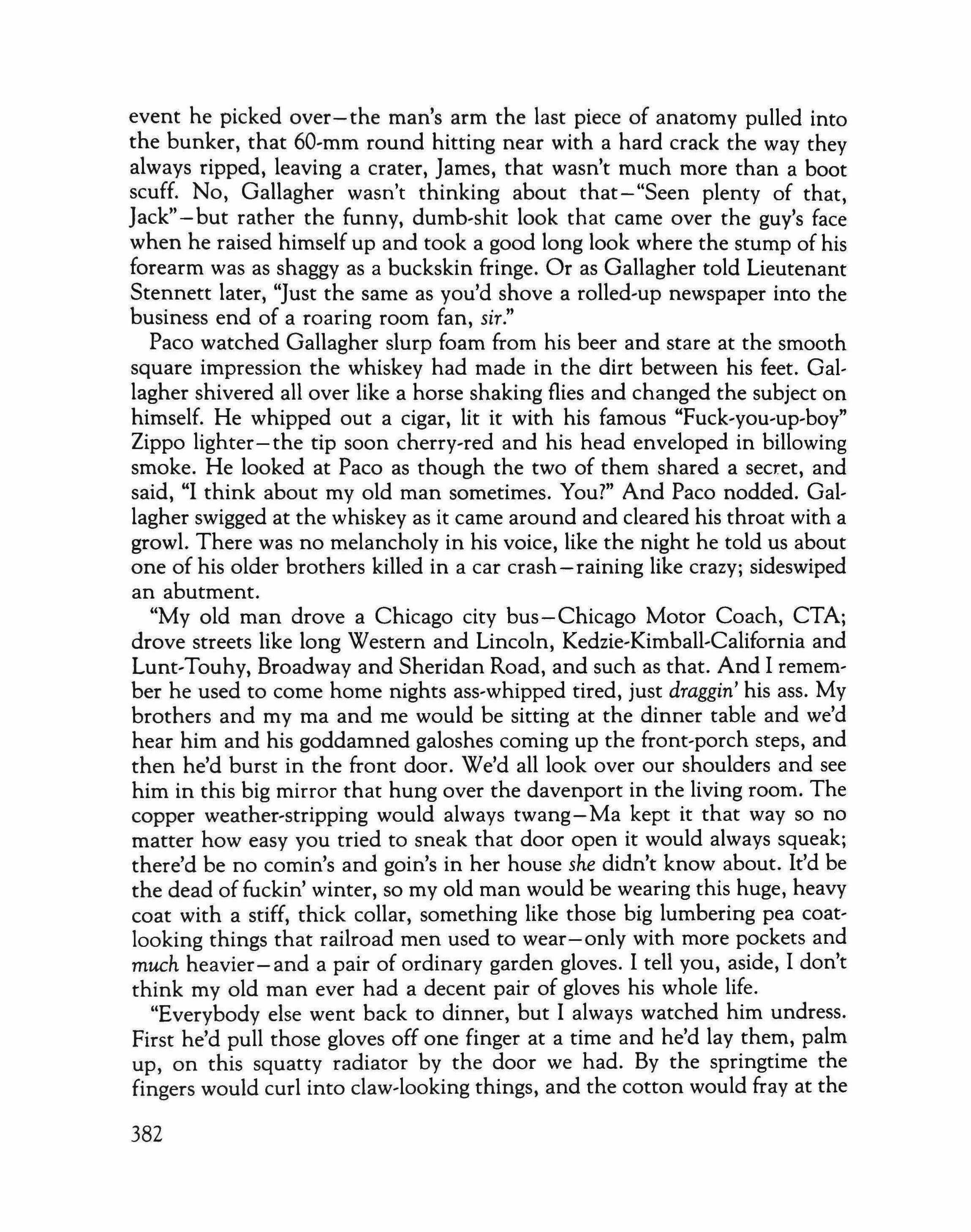
event he picked over-the man's arm the last piece of anatomy pulled into the bunker, that 60,mm round hitting near with a hard crack the way they always ripped, leaving a crater, James, that wasn't much more than a boot scuff. No, Gallagher wasn't thinking about that - "Seen plenty of that, Jack" - but rather the funny, dumb-shit look that came over the guy's face when he raised himself up and took a good long look where the stump of his forearm was as shaggy as a buckskin fringe. Or as Gallagher told Lieutenant Stennett later, "Just the same as you'd shove a rolled-up newspaper into the business end of a roaring room fan, sir."
Paco watched Gallagher slurp foam from his beer and stare at the smooth square impression the whiskey had made in the dirt between his feet. Gallagher shivered all over like a horse shaking flies and changed the subject on himself. He whipped out a cigar, lit it with his famous "Fuck-vou-up-boy"
Zippo lighter-the tip soon cherry-red and his head enveloped in billowing smoke. He looked at Paco as though the two of them shared a secret, and said, "I think about myoid man sometimes. You?" And Paco nodded. Gal, lagher swigged at the whiskey as it came around and cleared his throat with a growl. There was no melancholy in his voice, like the night he told us about one of his older brothers killed in a car crash - raining like crazy; sideswiped an abutment.
"Myoid man drove a Chicago city bus-Chicago Motor Coach, CTA; drove streets like long Western and Lincoln, Kedzie-Kirnball-Califomia and Lunr-Touhy, Broadway and Sheridan Road, and such as that. And I remem' ber he used to come home nights ass-whipped tired, just draggin' his ass. My brothers and my rna and me would be sitting at the dinner table and we'd hear him and his goddamned galoshes coming up the front-porch steps, and then he'd burst in the front door. We'd all look over our shoulders and see him in this big mirror that hung over the davenport in the living room. The copper weather-stripping would always twang-Ma kept it that way so no matter how easy you tried to sneak that door open it would always squeak; there'd be no comin's and goin's in her house she didn't know about. It'd be the dead of fuckin' winter, so myoid man would be wearing this huge, heavy coat with a stiff, thick collar, something like those big lumbering pea coat, looking things that railroad men used to wear-only with more pockets and much heavier-and a pair of ordinary garden gloves. I tell you, aside, I don't think myoid man ever had a decent pair of gloves his whole life.
"Everybody else went back to dinner, but I always watched him undress. First he'd pull those gloves off one finger at a time and he'd lay them, palm up, on this squatty radiator by the door we had. By the springtime the fingers would curl into claw-looking things, and the cotton would fray at the

fingers and they would unravel to the knuckles. Next'd come this gray scarf my great-aunt got him one year, that thing looped around his neck and tied like an ascot. Then he'd do the coat buttons-big as silver dollars they wereand haul that coat off and hang it, and the scarf, on a side hook at the back ofthe closet - a big brass thing you could hang a side ofbeef on. Then he had two sweaters-one a thick, loose, golfer-looking thing, and underneath that was a close-knit, navy-blue Veneck he'd had since God-knows-when and had patches and darned places a-plenty. And all that while he'd be standing there in these big-ass, ugly fuckin' galoshes-big as coal hods-unbuckled, but with his thick serge trousers bloused into them, real sloppy. He'd pry those fuckers off, and if it had snowed or rained, there'd be melted snow or mud sprayed all over mother's prized paint job. The galoshes went onto this big old baking sheet behind the closet door.
"Well, then he'd start on his bus driver's gear-punch and changer and watch, and the big black leather belt they hung on. That fuckin' changer was as big as the cast-iron bulldog that held open the kitchen door. There was a penny slot, two slots for nickels, one slot for dimes, a couple slots for quarters, and one slot for halves. I'd guess thirty-five, forty dollars. There was a slot for silver dollars, but he never used it. Bad luck, somehow, he told me once. Then would come the punch he had in a leather holster engraved with his initials-DOG-and clipped to his belt. The punch was real hefty, German-made, and would give you a star-shaped hole. He set the changer and the punch on Ma's gate-leg table, which was ruined with gouges and scratches. Then he'd pull his pocket watch from the shirt pocket where he kept his pencils-that watch as big as your hand. Seventeen jewels with roman numerals and a sweep second hand as thin as a sewing needle. He put that down with the changer and punch. 1 remember, too:' Gallagher said, snorting and grinning. "He used to pull that thing out and bullshit my uncles that it cost him a month's pay, and took food out of our mouths. He had it on a braided leather fob as long as your arm that drooped into his lap when he sat down, and he had a habit of running that fob through his hand, like he was stroking it - something the same as you see old women fingering the rosary. He laid that watch with the changer and the punch, coiling the fob around the watch like a Sunday sailor coiling up a deck rope." Gallagher coiled the fob around the watch in the air so we could all see it, as dark as it was.
Gallagher poured some whiskey in his beer, stirred it around a time or two and took a drink. "He'd haul that belt of his off, and 1 tell you, Jack, you could hear that fuckin' belt snap through every loop. You sure could tell what kind of an evenin' it was going to be by the sound of that fuckin' belt. If
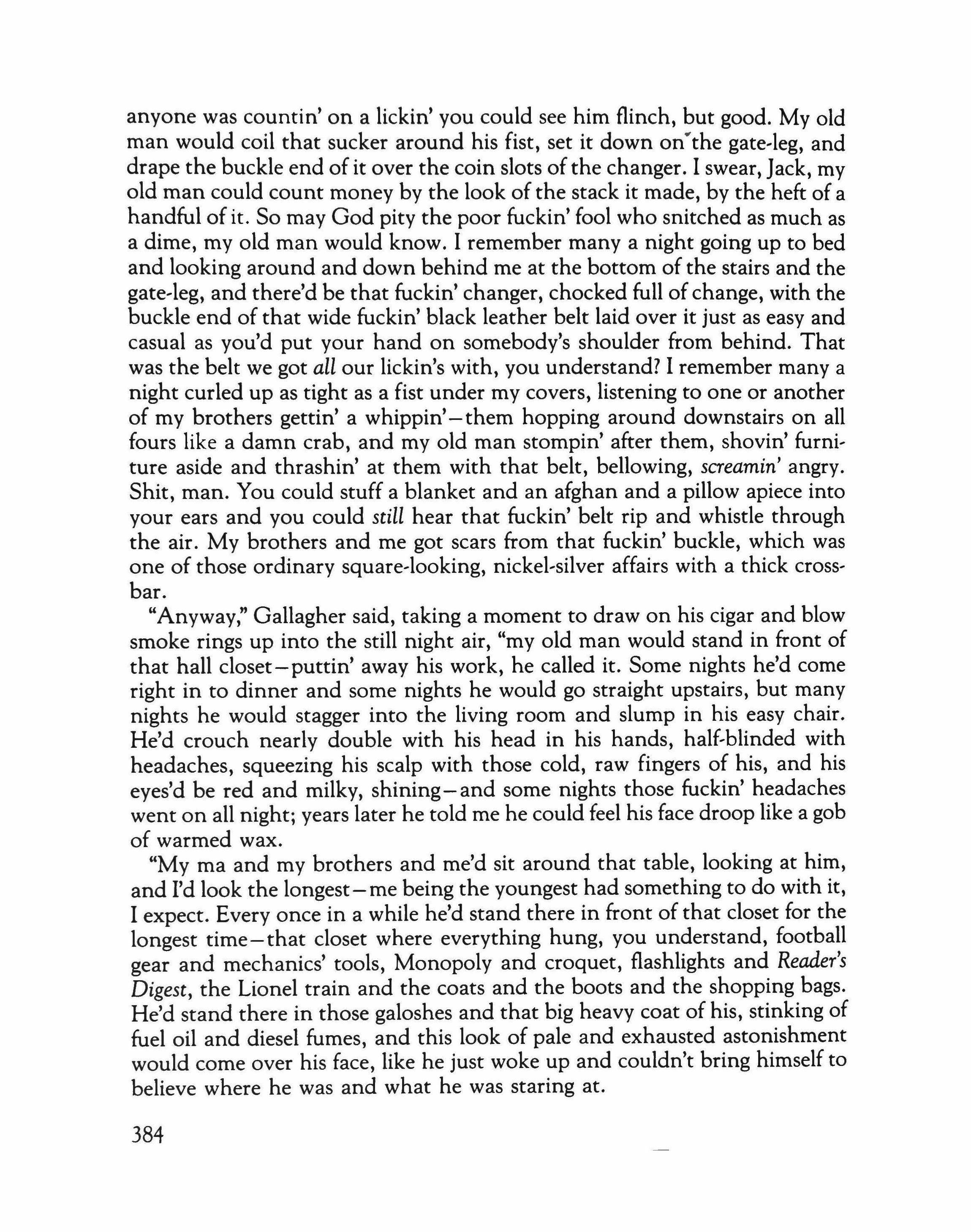
anyone was counrin' on a lickin' you could see him flinch, but good. Myoid man would coil that sucker around his fist, set it down on"the gate-leg, and drape the buckle end of it over the coin slots ofthe changer. I swear, Jack, my old man could count money by the look ofthe stack it made, by the heft of a handful of it. So may God pity the poor fuckin' fool who snitched as much as a dime, myoid man would know. I remember many a night going up to bed and looking around and down behind me at the bottom of the stairs and the gate-leg, and there'd be that fuckin' changer, chocked full ofchange, with the buckle end of that wide fuckin' black leather belt laid over it just as easy and casual as you'd put your hand on sornebodv's shoulder from behind. That was the belt we got all our lickin's with, you understand? I remember many a night curled up as tight as a fist under my covers, listening to one or another of my brothers gettin' a whippin'-them hopping around downstairs on all fours like a damn crab, and myoid man stompin' after them, shovin' furniture aside and thrashin' at them with that belt, bellowing, screamin' angry. Shit, man. You could stuff a blanket and an afghan and a pillow apiece into your ears and you could still hear that fuckin' belt rip and whistle through the air. My brothers and me got scars from that fuckin' buckle, which was one of those ordinary square-looking, nickel-silver affairs with a thick cross� bar.
"Anyway," Gallagher said, taking a moment to draw on his cigar and blow smoke rings up into the still night air, "myoid man would stand in front of that hall closet-puttin' away his work, he called it. Some nights he'd come right in to dinner and some nights he would go straight upstairs, but many nights he would stagger into the living room and slump in his easy chair. He'd crouch nearly double with his head in his hands, half-blinded with headaches, squeezing his scalp with those cold, raw fingers of his, and his eyes'd be red and milky, shining-and some nights those fuckin' headaches went on all night; years later he told me he could feel his face droop like a gob of warmed wax.
"My ma and my brothers and rne'd sit around that table, looking at him, and I'd look the longest-me being the youngest had something to do with it, I expect. Every once in a while he'd stand there in front of that closet for the longest time-that closet where everything hung, you understand, football gear and mechanics' tools, Monopoly and croquet, flashlights and Reader's Digest, the Lionel train and the coats and the boots and the shopping bags. He'd stand there in those galoshes and that big heavy coat of his, stinking of fuel oil and diesel fumes, and this look of pale and exhausted astonishment would come over his face, like he just woke up and couldn't bring himself to believe where he was and what he was staring at.

"Fuckin-A," Gallagher said, disgusted, drunk. "Myoid man busted his ass all his life, and all's he got out of it was beat-up hands, bad eyes and a bend in his back.
"And you know what?" Gallagher said then, sniffing and laughing at the irony and taking another healthy swig of whiskey and beer. "That look was the same as come over the poor fuckin' fool from Bravo Company a couple days ago when he drew himself out of that bunker and took a good long look at what was left of his arm. And then the pain worked itself up his arm and into his face, and after that he never stopped screaming." And we all had to shiver, then, remembering the screams.
"Fuckin' Bravo Company," Gallagher said, brushing at the mosquitoes in his hair and sitting up, "How you gonna have any pity on those geeks?"

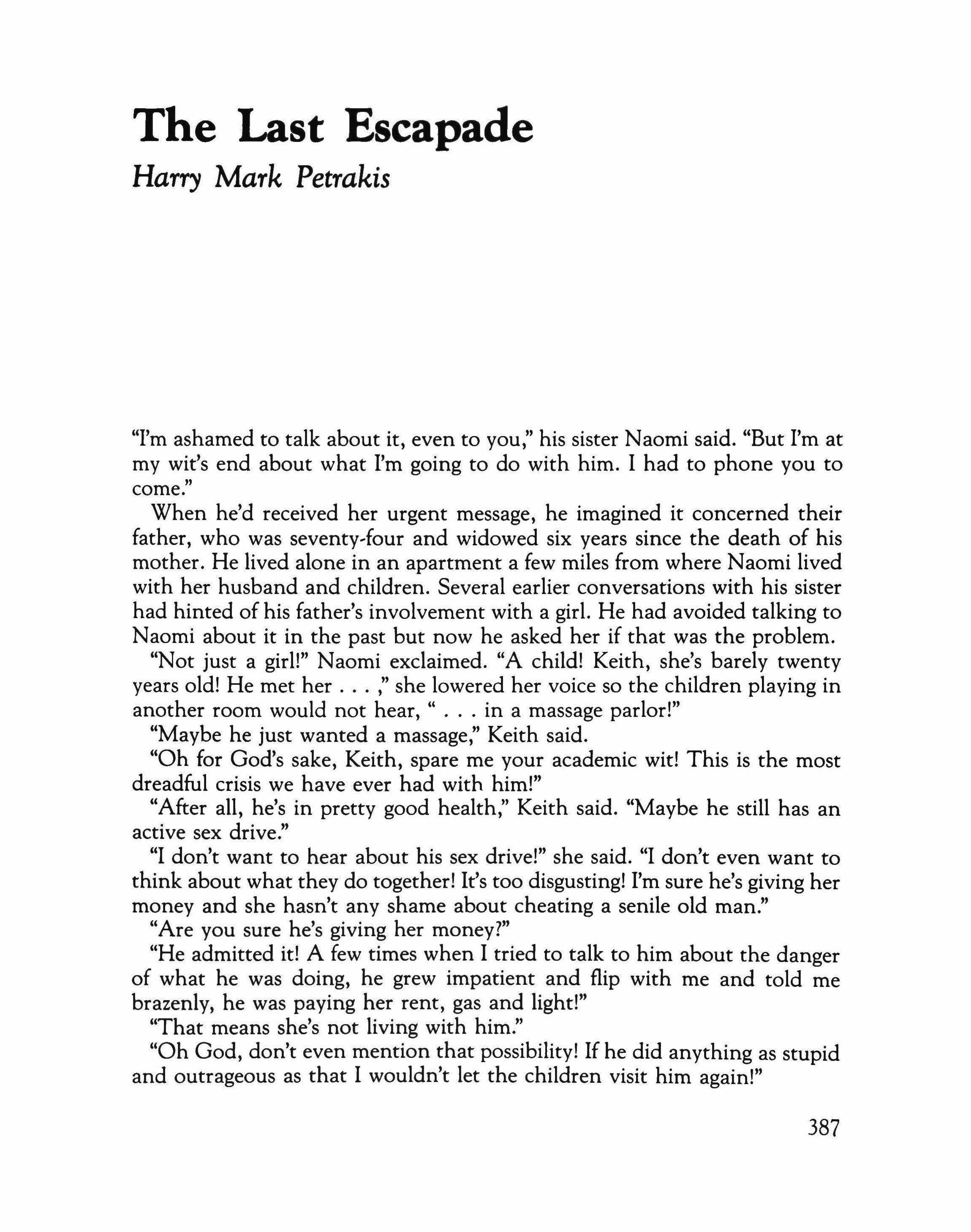
"I'm ashamed to talk about it, even to you," his sister Naomi said. "But I'm at my wit's end about what I'm going to do with him. I had to phone you to come."
When he'd received her urgent message, he imagined it concerned their father, who was seventy-four and widowed six years since the death of his mother. He lived alone in an apartment a few miles from where Naomi lived with her husband and children. Several earlier conversations with his sister had hinted of his father's involvement with a girl. He had avoided talking to Naomi about it in the past but now he asked her if that was the problem.
"Not just a girl!" Naomi exclaimed. "A child! Keith, she's barely twenty years old! He met her ," she lowered her voice so the children playing in another room would not hear, in a massage parlor!"
"Maybe he just wanted a massage," Keith said.
"Oh for God's sake, Keith, spare me your academic wit! This is the most dreadful crisis we have ever had with him!"
"After all, he's in pretty good health," Keith said. "Maybe he still has an active sex drive."
"I don't want to hear about his sex drive!" she said. "I don't even want to think about what they do together! It's too disgusting! I'm sure he's giving her money and she hasn't any shame about cheating a senile old man."
"Are you sure he's giving her money?"
"He admitted it! A few times when I tried to talk to him about the danger of what he was doing, he grew impatient and flip with me and told me brazenly, he was paying her rent, gas and light!"
"That means she's not living with him."
"Oh God, don't even mention that possibility! If he did anything as stupid and outrageous as that I wouldn't let the children visit him again!"
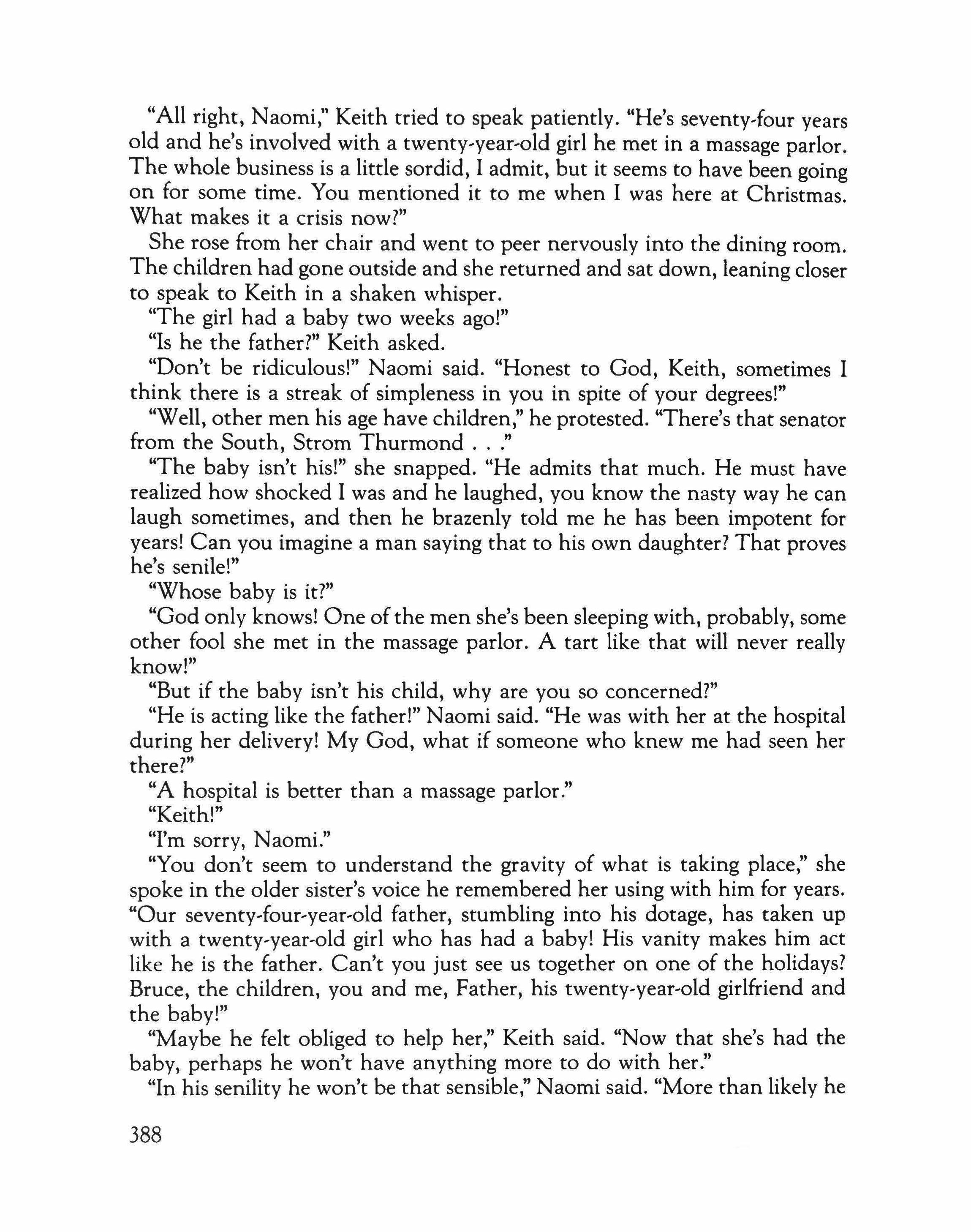
"All right, Naomi," Keith tried to speak patiently. "He's seventy-four years old and he's involved with a twentv-vear-old girl he met in a massage parlor. The whole business is a little sordid, I admit, but it seems to have been going on for some time. You mentioned it to me when I was here at Christmas. What makes it a crisis now?"
She rose from her chair and went to peer nervously into the dining room. The children had gone outside and she returned and sat down, leaning closer to speak to Keith in a shaken whisper.
"The girl had a baby two weeks ago!"
"Is he the father?" Keith asked.
"Don't be ridiculous!" Naomi said. "Honest to God, Keith, sometimes I think there is a streak of simpleness in you in spite of your degrees!"
"Well, other men his age have children," he protested. "There's that senator from the South, Strom Thurmond
"The baby isn't his!" she snapped. "He admits that much. He must have realized how shocked I was and he laughed, you know the nasty way he can laugh sometimes, and then he brazenly told me he has been impotent for years! Can you imagine a man saying that to his own daughter? That proves he's senile!"
"Whose baby is it?"
"God only knows! One ofthe men she's been sleeping with, probably, some other fool she met in the massage parlor. A tart like that will never really know!"
"But if the baby isn't his child, why are you so concerned?"
"He is acting like the father!" Naomi said. "He was with her at the hospital during her delivery! My God, what if someone who knew me had seen her there?"
"A hospital is better than a massage parlor."
"Keith!"
"I'm sorry, Naomi."
"You don't seem to understand the gravity of what is taking place," she spoke in the older sister's voice he remembered her using with him for years. "Our seventy-four-vear-old father, stumbling into his dotage, has taken up with a twenty-year-old girl who has had a baby! His vanity makes him act like he is the father. Can't you just see us together on one of the holidays? Bruce, the children, you and me, Father, his twenty-year-old girlfriend and the baby!"
"Maybe he felt obliged to help her," Keith said. "Now that she's had the baby, perhaps he won't have anything more to do with her."
"In his senility he won't be that sensible," Naomi said. "More than likely he
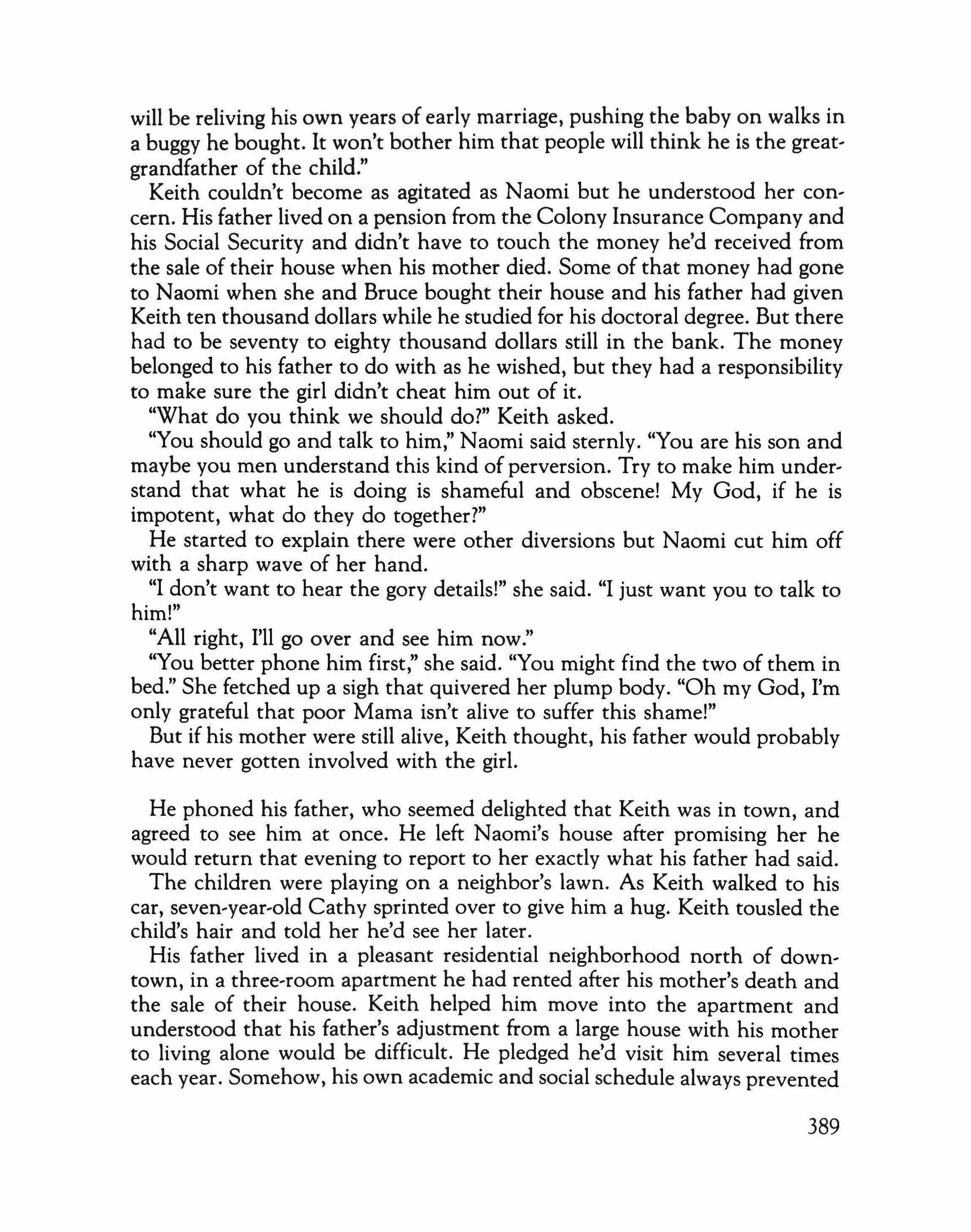
will be reliving his own years of early marriage, pushing the baby on walks in a buggy he bought. It won't bother him that people will think he is the greatgrandfather of the child."
Keith couldn't become as agitated as Naomi but he understood her concern. His father lived on a pension from the Colony Insurance Company and his Social Security and didn't have to touch the money he'd received from the sale of their house when his mother died. Some of that money had gone to Naomi when she and Bruce bought their house and his father had given Keith ten thousand dollars while he studied for his doctoral degree. But there had to be seventy to eighty thousand dollars still in the bank. The money belonged to his father to do with as he wished, but they had a responsibility to make sure the girl didn't cheat him out of it.
"What do you think we should do?" Keith asked.
"You should go and talk to him," Naomi said sternly. "You are his son and maybe you men understand this kind of perversion. Try to make him understand that what he is doing is shameful and obscene! My God, if he is impotent, what do they do together?"
He started to explain there were other diversions but Naomi cut him off with a sharp wave of her hand.
"1 don't want to hear the gory details!" she said. "1 just want you to talk to him!"
"All right, I'll go over and see him now."
"You better phone him first:' she said. "You might find the two of them in bed." She fetched up a sigh that quivered her plump body. "Oh my God, I'm only grateful that poor Mama isn't alive to suffer this shame!"
But if his mother were still alive, Keith thought, his father would probably have never gotten involved with the girl.
He phoned his father, who seemed delighted that Keith was in town, and agreed to see him at once. He left Naomi's house after promising her he would return that evening to report to her exactly what his father had said.
The children were playing on a neighbor's lawn. As Keith walked to his car, seven-year-old Cathy sprinted over to give him a hug. Keith tousled the child's hair and told her he'd see her later.
His father lived in a pleasant residential neighborhood north of downtown, in a three-room apartment he had rented after his mother's death and the sale of their house. Keith helped him move into the apartment and understood that his father's adjustment from a large house with his mother to living alone would be difficult. He pledged he'd visit him several times each year. Somehow, his own academic and social schedule always prevented
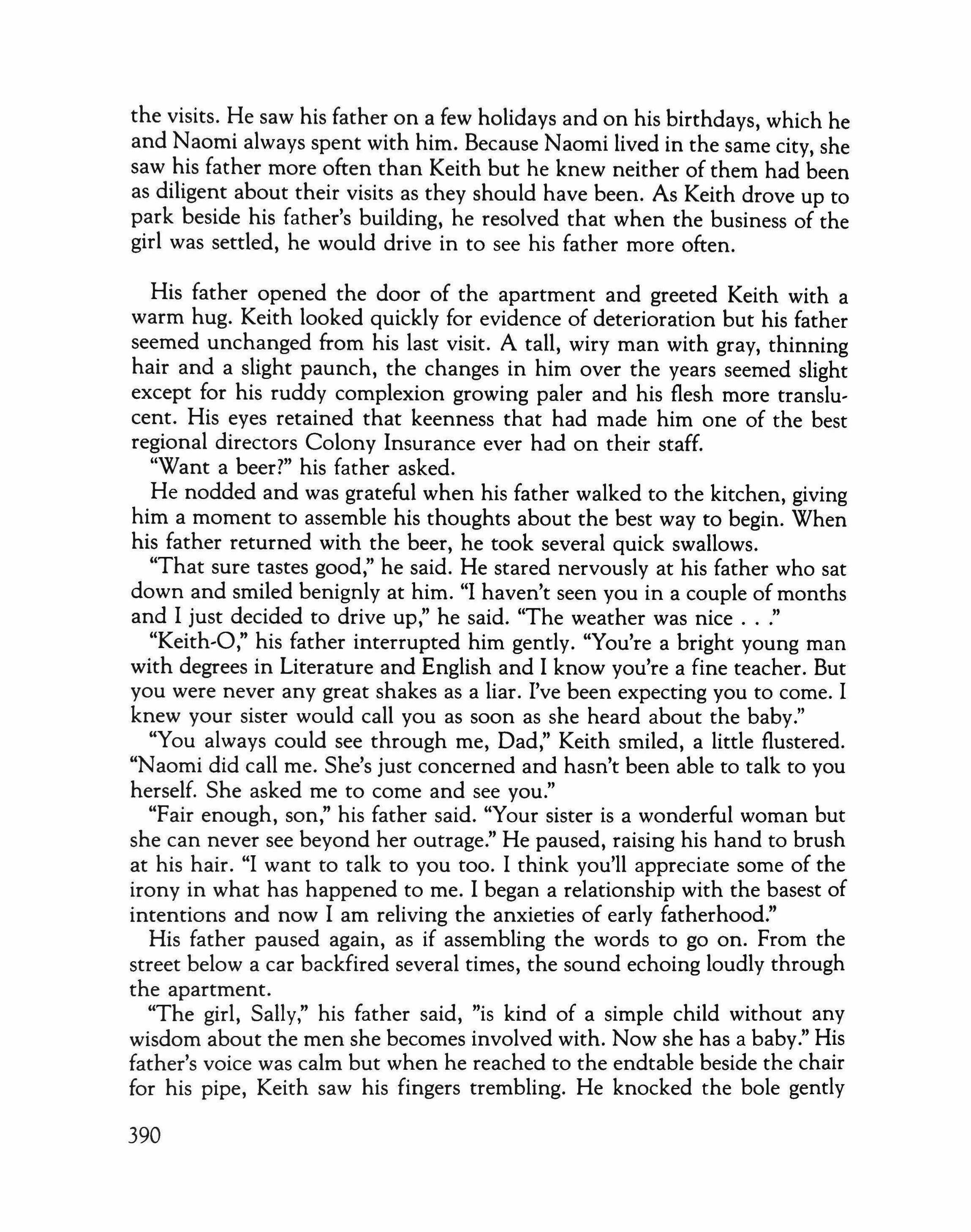
the visits. He saw his father on a few holidays and on his birthdays, which he and Naomi always spent with him. Because Naomi lived in the same city, she saw his father more often than Keith but he knew neither of them had been as diligent about their visits as they should have been. As Keith drove up to park beside his father's building, he resolved that when the business of the girl was settled, he would drive in to see his father more often.
His father opened the door of the apartment and greeted Keith with a warm hug. Keith looked quickly for evidence of deterioration but his father seemed unchanged from his last visit. A tall, wiry man with gray, thinning hair and a slight paunch, the changes in him over the years seemed slight except for his ruddy complexion growing paler and his flesh more translucent. His eyes retained that keenness that had made him one of the best regional directors Colony Insurance ever had on their staff.
"Want a beer?" his father asked.
He nodded and was grateful when his father walked to the kitchen, giving him a moment to assemble his thoughts about the best way to begin. When his father returned with the beer, he took several quick swallows.
"That sure tastes good," he said. He stared nervously at his father who sat down and smiled benignly at him. "I haven't seen you in a couple of months and I just decided to drive up," he said. "The weather was nice
"Keith-O," his father interrupted him gently. "You're a bright young man with degrees in Literature and English and I know you're a fine teacher. But you were never any great shakes as a liar. I've been expecting you to come. I knew your sister would call you as soon as she heard about the baby."
"You always could see through me, Dad," Keith smiled, a little flustered. "Naomi did call me. She's just concerned and hasn't been able to talk to you herself. She asked me to come and see you."
"Fair enough, son," his father said. "Your sister is a wonderful woman but she can never see beyond her outrage." He paused, raising his hand to brush at his hair. "I want to talk to you too. I think you'll appreciate some of the irony in what has happened to me. I began a relationship with the basest of intentions and now I am reliving the anxieties of early fatherhood."
His father paused again, as if assembling the words to go on. From the street below a car backfired several times, the sound echoing loudly through the apartment.
"The girl, Sally," his father said, "is kind of a simple child without any wisdom about the men she becomes involved with. Now she has a baby." His father's voice was calm but when he reached to the endtable beside the chair for his pipe, Keith saw his fingers trembling. He knocked the bole gently

against an ashtray. "When I first saw that red, wriggling, naked little body I was sorry for it really sorry and sorry for his mother, who was still such a child, and sorry that I wasn't younger."
"If you were younger, would you marry the girl?" Keith smiled, as if to reassure his father that he was joking.
"I think I would have had more sense than that," his father said. "But if I were younger I could have helped her and kept an eye on the two of them." He paused. "We've never really had that serious a relationship. I know she doesn't really love me in the way a woman loves a man and she has deceived me about needing money for her rent or to fix her car. She might even be giving some of the money I give her for those expenses to some man. She's foolish in that way."
He tapped fresh tobacco into his pipe, a familiar gesture that reminded Keith ofhis years ofgrowing up. He suddenly noticed things about his father, how his sweater was torn at the sleeve and stained at the waist, things his mother would never have allowed. His father caught him staring at him and sighed.
"I'm sorry ifI'm hurting and disappointing you and Naomi," he said. "And I didn't plan for this to happen. I was lonely and feeling, you know, kind of horny no matter what the young think, that can still happen often at my age. I had walked past that massage parlor at least two dozen times and, one day, I simply walked inside. I almost walked right out again except for a pleasant, matronly lady who talked to me about how natural my visit was. I gave her some money and then I went into a small room with a table like doctors have in their examining rooms. I started to unbutton my shirt, the woman had told me to undress, and then this girl came in. She was very young and blond and, when she smiled, she didn't have very good teeth. She was wearing a kind of little toga and when I saw her I started buttoning my shirt again. She must have been used to old men having second thoughts because she finished unbuttoning my shirt. When she started to unbuckle my trousers, I told her I'd do it. I felt I was exposing myself in a school yard full of children. I was conscious of how old I was and my skinny legs and I panicked. I told her I had something to do and pulled up my pants and beat it out of there like a bulldog had its teeth in my ass."
Keith was suddenly conscious that he had been listening to his father as if he were hearing him for the first time in years.
"I would never have had the courage to go back into that massage parlor," his father said, "but about a week after that first aborted visit, I was shopping in the Dominick's on Laramie and, in the produce section, I saw her. My first impulse was to run but she looked straight at me over a stack of tomatoes and
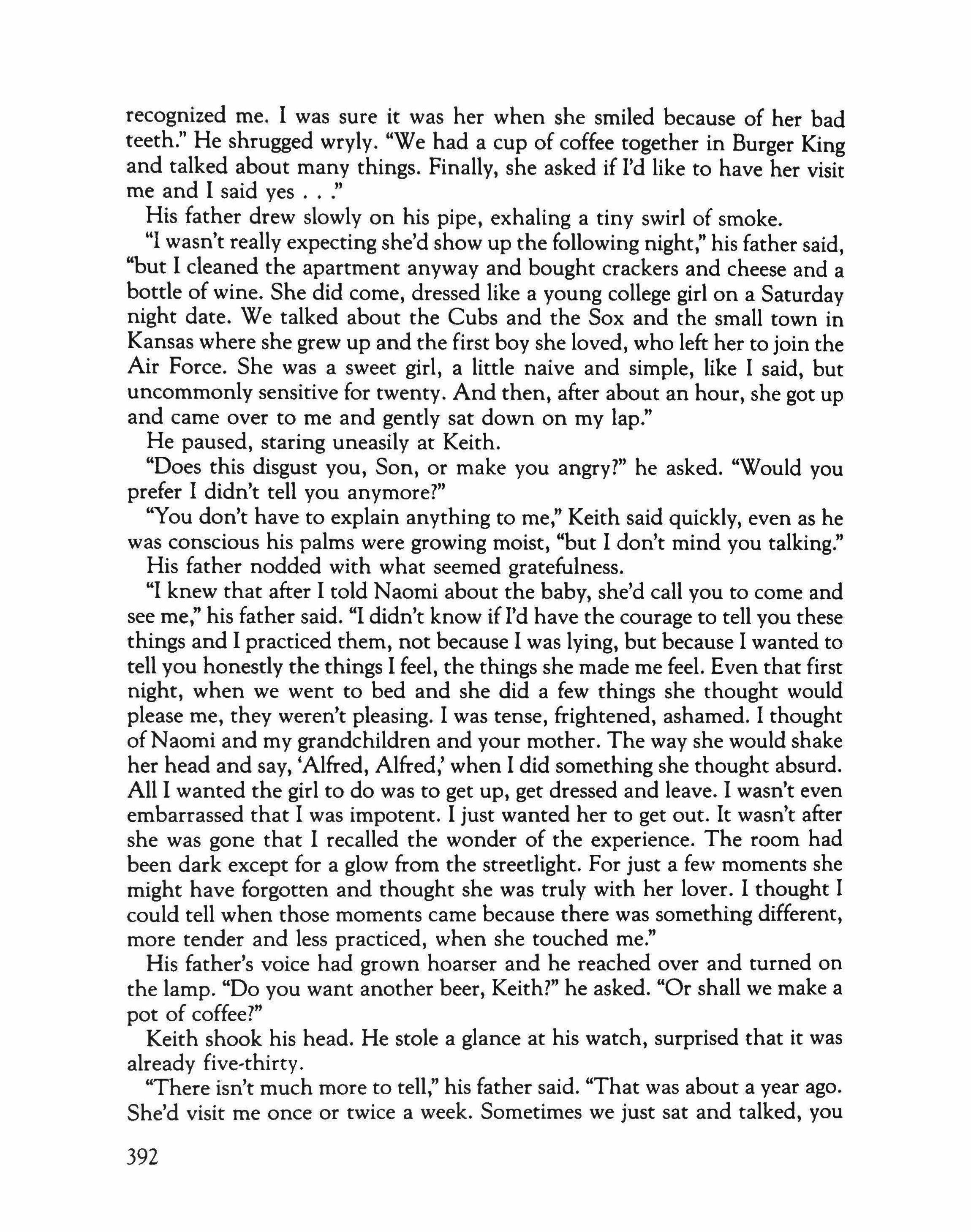
recognized me. I was sure it was her when she smiled because of her bad teeth." He shrugged wryly. "We had a cup of coffee together in Burger King and talked about many things. Finally, she asked if I'd like to have her visit me and I said yes ."
His father drew slowly on his pipe, exhaling a tiny swirl of smoke.
"I wasn't really expecting she'd show up the following night," his father said, "but I cleaned the apartment anyway and bought crackers and cheese and a bottle of wine. She did come, dressed like a young college girl on a Saturday night date. We talked about the Cubs and the Sox and the small town in Kansas where she grew up and the first boy she loved, who left her to join the Air Force. She was a sweet girl, a little naive and simple, like I said, but uncommonly sensitive for twenty. And then, after about an hour, she got up and came over to me and gently sat down on my lap."
He paused, staring uneasily at Keith.
"Does this disgust you, Son, or make you angry?" he asked. "Would you prefer I didn't tell you anymore?"
"You don't have to explain anything to me," Keith said quickly, even as he was conscious his palms were growing moist, "but I don't mind you talking."
His father nodded with what seemed gratefulness.
"I knew that after I told Naomi about the baby, she'd call you to come and see me," his father said. "I didn't know if I'd have the courage to tell you these things and I practiced them, not because I was lying, but because I wanted to tell you honestly the things I feel, the things she made me feel. Even that first night, when we went to bed and she did a few things she thought would please me, they weren't pleasing. I was tense, frightened, ashamed. I thought of Naomi and my grandchildren and your mother. The way she would shake her head and say, 'Alfred, Alfred,' when I did something she thought absurd. All I wanted the girl to do was to get up, get dressed and leave. I wasn't even embarrassed that I was impotent. I just wanted her to get out. It wasn't after she was gone that I recalled the wonder of the experience. The room had been dark except for a glow from the streetlight. For just a few moments she might have forgotten and thought she was truly with her lover. I thought I could tell when those moments came because there was something different, more tender and less practiced, when she touched me."
His father's voice had grown hoarser and he reached over and turned on the lamp. "Do you want another beer, Keith?" he asked. "Or shall we make a pot of coffee?"
Keith shook his head. He stole a glance at his watch, surprised that it was already five-thirty.
"There isn't much more to tell," his father said. "That was about a year ago. She'd visit me once or twice a week. Sometimes we just sat and talked, you

know, the way she might have talked with her own father," he grimaced, "or her grandfather. Sometimes she'd ask me for money for her rent or for repairs on her car. She had to have some dental work done and the dentist told her he could cap her bad teeth. She didn't ask me for that money but there was such a naked pleading in her voice and eyes, like a little girl begging for something she wanted more than anything else in the world. I had the dentist fix her teeth and paid him myself."
Keith didn't ask how much that work had cost but his father understood.
"It cost about fifteen hundred dollars," his father said, "but she looked so much better and was so delighted. When she came to see me, right from the dentist's office after he'd finished, she told me she smiled at everybody she passed on the street." He laughed softly. "If I thought her gratitude would make her come to see me more often, I was mistaken. Sometimes I wouldn't see her for a couple of weeks. And then, during one visit, she told me she was pregnant. She had told me before of the men she'd been involved with, one bastard after another, so even if she'd known who the father was, it wouldn't have made any difference. She had been living with one fellow and one day he kicked her out. Just like that. Then she met a mechanic who kept beating her up. She came over once with a black eye and a swollen cheek. I really bawled her out then, the way I might have if she'd been my granddaughter, and she cried a little. She broke up with him too. I'm not sure how. Maybe she found the sense to leave him."
From the street a siren wailed, the strident sound sweeping through the room. His father waited until the noise had passed.
"I don't think she has anyone now," his father said. "She's fascinated with the baby. He's like a new toy to her, a living toy, but she loves him too. I felt some of that love when I waited in the hospital with her and first saw her with the baby. He was such a beautiful little boy and in some strange, foolish way I thought of the boy belonging to me too. Since then I realize how absurd the whole business is really. She's not related to me and the baby isn't mine. But I enjoy seeing her and look forward to their visits. In the few times the three of us have been together, I feel happier than I have felt in years."
There was a long silence, his father not talking. Keith tried to think of something to say. "What is going to happen to her?" he asked finally.
"I don't know:' his father said slowly. "The baby is enough for now but the day will come when she'll take up with another man, another bastard no doubt, she doesn't seem able to choose any other kind. She's young, and I suppose she'll make it through, but I worry about the baby."
He stared at Keith, who grew uncomfortable under the intensity of his father's gaze.
"You know, son:' his father said quietly, "I don't want to make excuses but
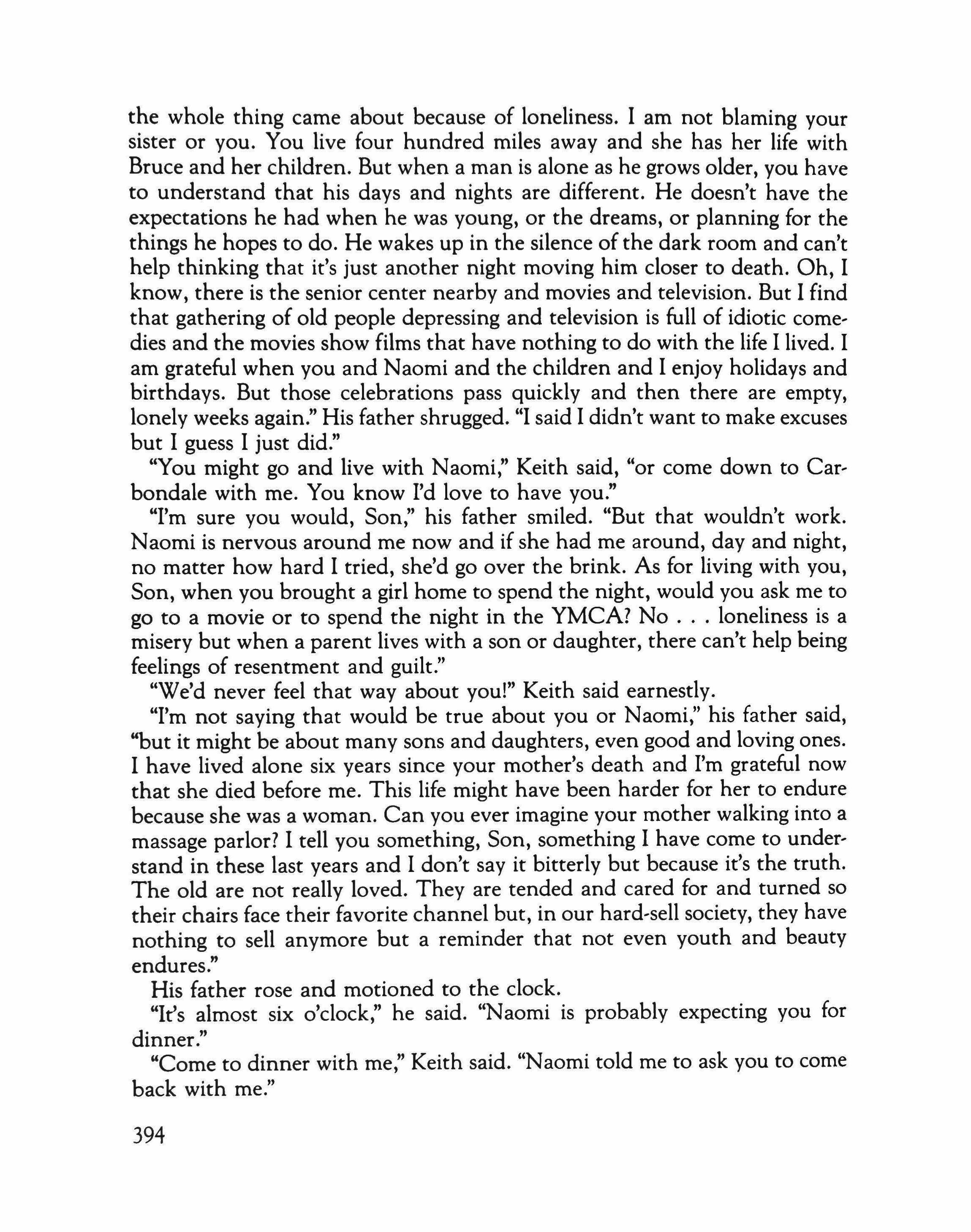
the whole thing came about because of loneliness. I am not blaming your sister or you. You live four hundred miles away and she has her life with Bruce and her children. But when a man is alone as he grows older, you have to understand that his days and nights are different. He doesn't have the expectations he had when he was young, or the dreams, or planning for the things he hopes to do. He wakes up in the silence of the dark room and can't help thinking that it's just another night moving him closer to death. Oh, I know, there is the senior center nearby and movies and television. But I find that gathering of old people depressing and television is full of idiotic come' dies and the movies show films that have nothing to do with the life I lived. I am grateful when you and Naomi and the children and I enjoy holidays and birthdays. But those celebrations pass quickly and then there are empty, lonely weeks again." His father shrugged. "I said I didn't want to make excuses but I guess I just did."
"You might go and live with Naomi," Keith said, "or come down to Car' bondale with me. You know I'd love to have you."
"I'm sure you would, Son:' his father smiled. "But that wouldn't work. Naomi is nervous around me now and if she had me around, day and night, no matter how hard I tried, she'd go over the brink. As for living with you, Son, when you brought a girl home to spend the night, would you ask me to go to a movie or to spend the night in the YMCA? No loneliness is a misery but when a parent lives with a son or daughter, there can't help being feelings of resentment and guilt."
"We'd never feel that way about you!" Keith said earnestly.
"I'm not saying that would be true about you or Naomi," his father said, "but it might be about many sons and daughters, even good and loving ones. I have lived alone six years since your mother's death and I'm grateful now that she died before me. This life might have been harder for her to endure because she was a woman. Can you ever imagine your mother walking into a massage parlor? I tell you something, Son, something I have come to under, stand in these last years and I don't say it bitterly but because it's the truth. The old are not really loved. They are tended and cared for and turned so their chairs face their favorite channel but, in our hard-sell society, they have nothing to sell anymore but a reminder that not even youth and beauty endures."
His father rose and motioned to the clock.
"It's almost six o'clock," he said. "Naomi is probably expecting you for d·inner.
"Come to dinner with me:' Keith said. "Naomi told me to ask you to come back with me."

"The hell she did," his father laughed. "She's so mad at me these days that she might poison my salad. You go ahead and have your dinner and, if you get a chance to talk to her alone, try to make her understand the things I told you about the girl and me."
Keith rose and hesitated a moment longer. He started to tell his father that he'd stay in town and they'd spend some time together. Then he remembered the date he had with Marcie in Carbondale the following evening.
"Let's eat together this evening anyway," he said. "I'll call Naomi and tell her you and I are having dinner together. I'll drive back to Carbondale later tonight."
His father gave his arm an affectionate squeeze.
"You stop squirming and go ahead now," he said reassuringly. "You really listened to me and I think you understand but it's got to be uncomfortable for both of us. I am relieved I got it out but I don't want to talk about it anymore and we'll strain talking about other things. Maybe on your next visit we'll spend more time together. If you didn't mind, maybe I could have Sally bring the baby up here for you to see. She likes to feel respectable and that would please her, but only if you didn't have any objections."
"That would be fine with me, Dad," Keith said.
"There's one more thing, Son," his father said. "You know I've got some money saved. Not a great deal, but money that will go to you and Naomi when I'm gone. I may want to make some provision for the baby, some money for his schooling and for other things. I hope you and Naomi will understand and won't try to cut the child out. I'm not asking you to give it all up, just to share some of it."
"It's your money, Dad," Keith said. "You do what you want with it."
"I'll leave most of it to you and Naomi," his father said. "I just feel sorry for the baby and would like to provide for him too."
On an impulse Keith moved back and embraced his father. He smelled the scents of his tobacco and the odors of food and stale coffee grounds on his sweater. He remembered then how clean his mother had always kept his father's clothing.
When he had walked down the stairs and reached his car he looked up toward the apartment windows. He wasn't sure whether his father was stand, ing at the window, but he waved anyway. He climbed into his car buoyed by a sense of resolve he would explain everything his father had told him to Naomi.
But with every block he drove through the gathering twilight, the futility of explanation to his sister overwhelmed him. He imagined her outrage and
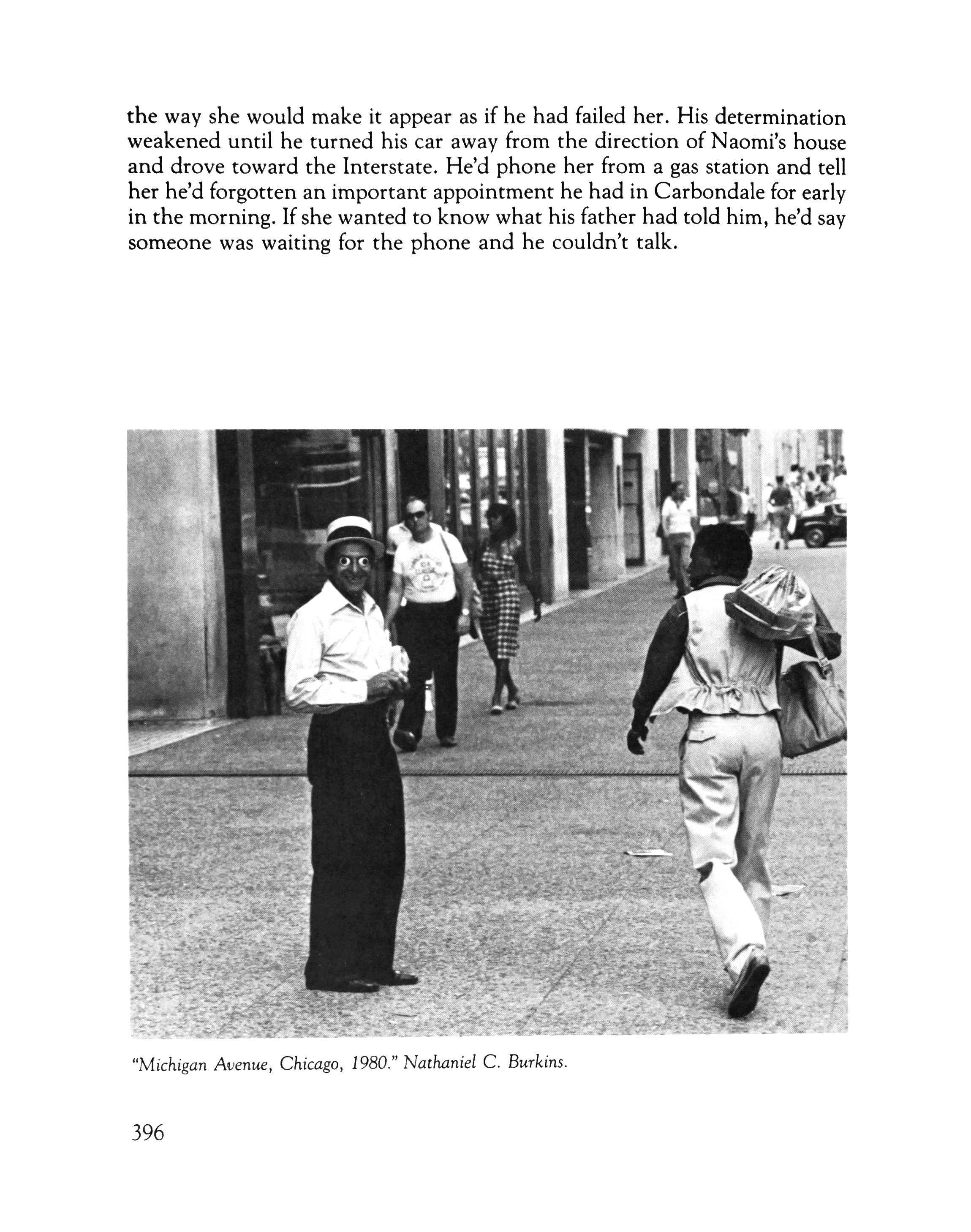
the way she would make it appear as if he had failed her. His determination weakened until he turned his car away from the direction of Naomi's house and drove toward the Interstate. He'd phone her from a gas station and tell her he'd forgotten an important appointment he had in Carbondale for early in the morning. If she wanted to know what his father had told him, he'd say someone was waiting for the phone and he couldn't talk.

Puppet-woman pulled to tiptoe sings gospel in a man's counterfeited voice. It's almost dusk, but you can see sneakers down under the cloth backdrop; you can see strings let down through sky,holes twitch her into an alto
"How Great Thou Art."
Loop theaters wink out of the Chicago collage the street guy named Apostle pasted behind his box-sized stage. Minute world, the focus concentrates desire not belief. A tired clerk turns off the power in Goldblatt's southwest window behind Apostle & begins to undress a dummy, first skinning off the check skirt.
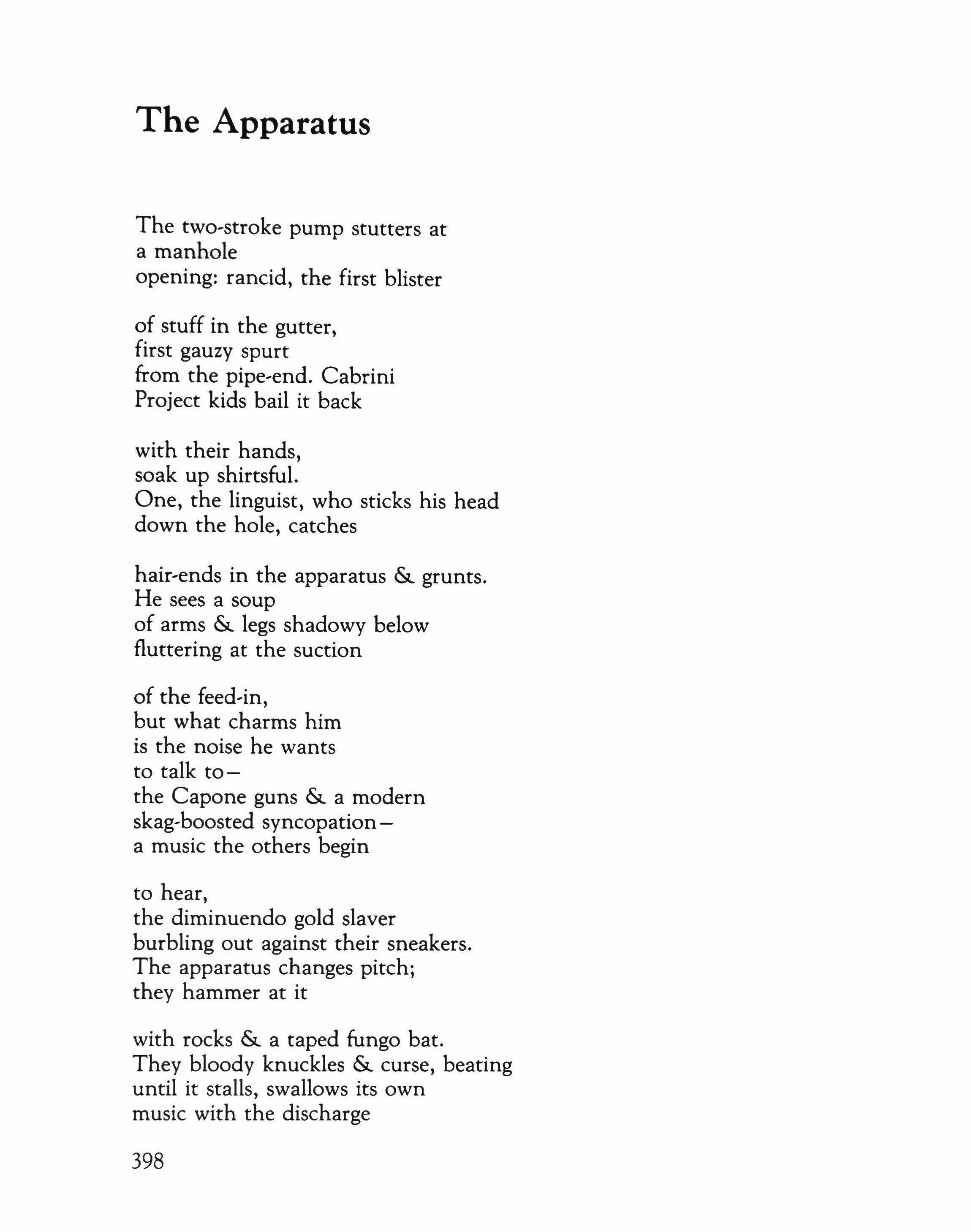
The two-stroke pump stutters at a manhole
opening: rancid, the first blister
of stuff in the gutter, first gauzy spurt from the pipe-end. Cabrini Project kids bail it back with their hands, soak up shirtsful. One, the linguist, who sticks his head down the hole, catches
hair-ends in the apparatus & grunts. He sees a soup of arms & legs shadowy below fluttering at the suction
of the feed-in, but what charms him is the noise he wants to talk to-
the Capone guns & a modern skag-boosred syncopationa music the others begin to hear, the diminuendo gold slaver burbling out against their sneakers. The apparatus changes pitch; they hammer at it
with rocks & a taped fungo bat. They bloody knuckles & curse, beating until it stalls, swallows its own music with the discharge
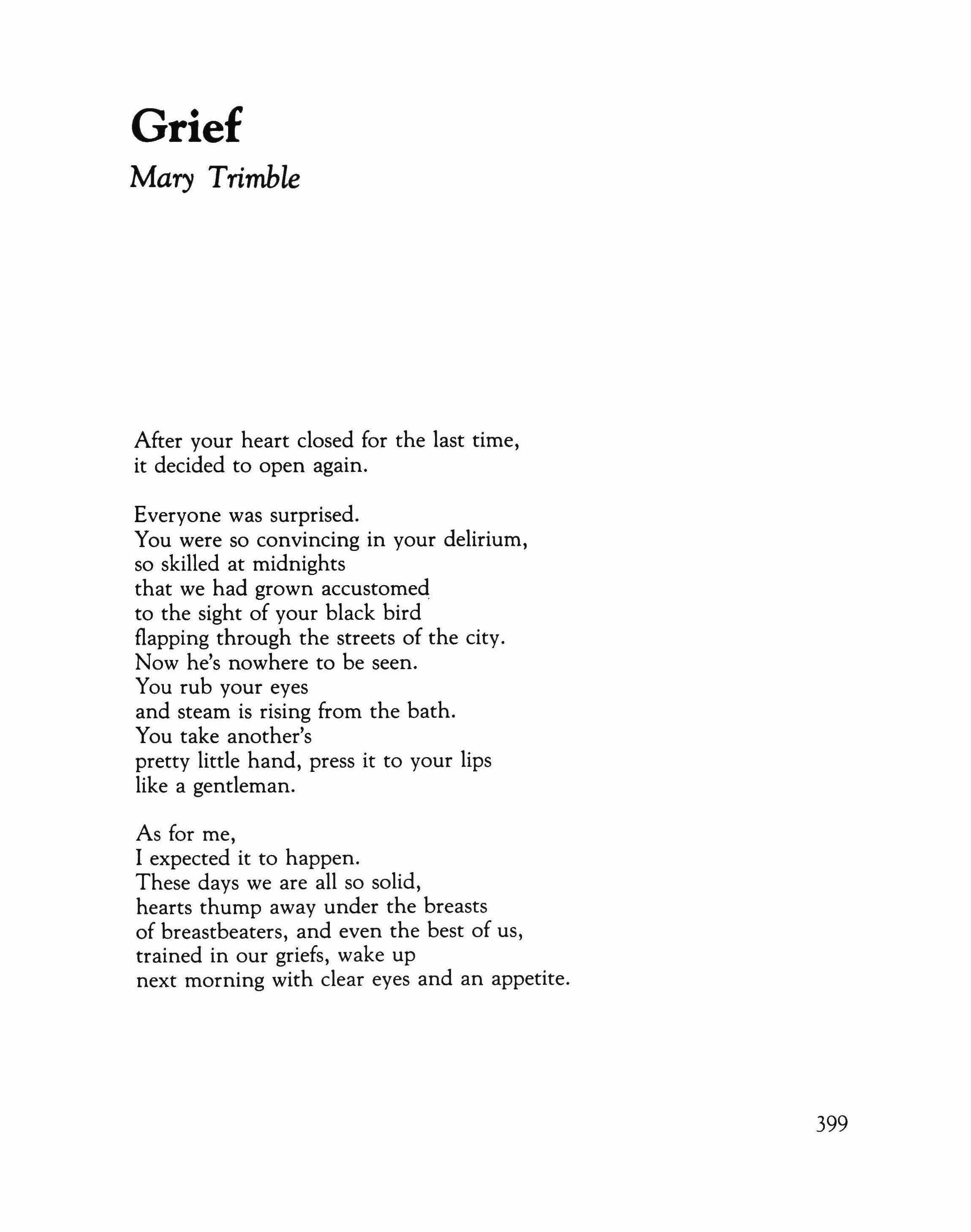
After your heart closed for the last time, it decided to open again.
Everyone was surprised. You were so convincing in your delirium, so skilled at midnights that we had grown accustomed to the sight of your black bird flapping through the streets of the city. Now he's nowhere to be seen. You rub your eyes and steam is rising from the bath. You take another's pretty little hand, press it to your lips like a gentleman.
As for me, I expected it to happen. These days we are all so solid, hearts thump away under the breasts of breastbeaters, and even the best of us, trained in our griefs, wake up next morning with clear eyes and an appetite.
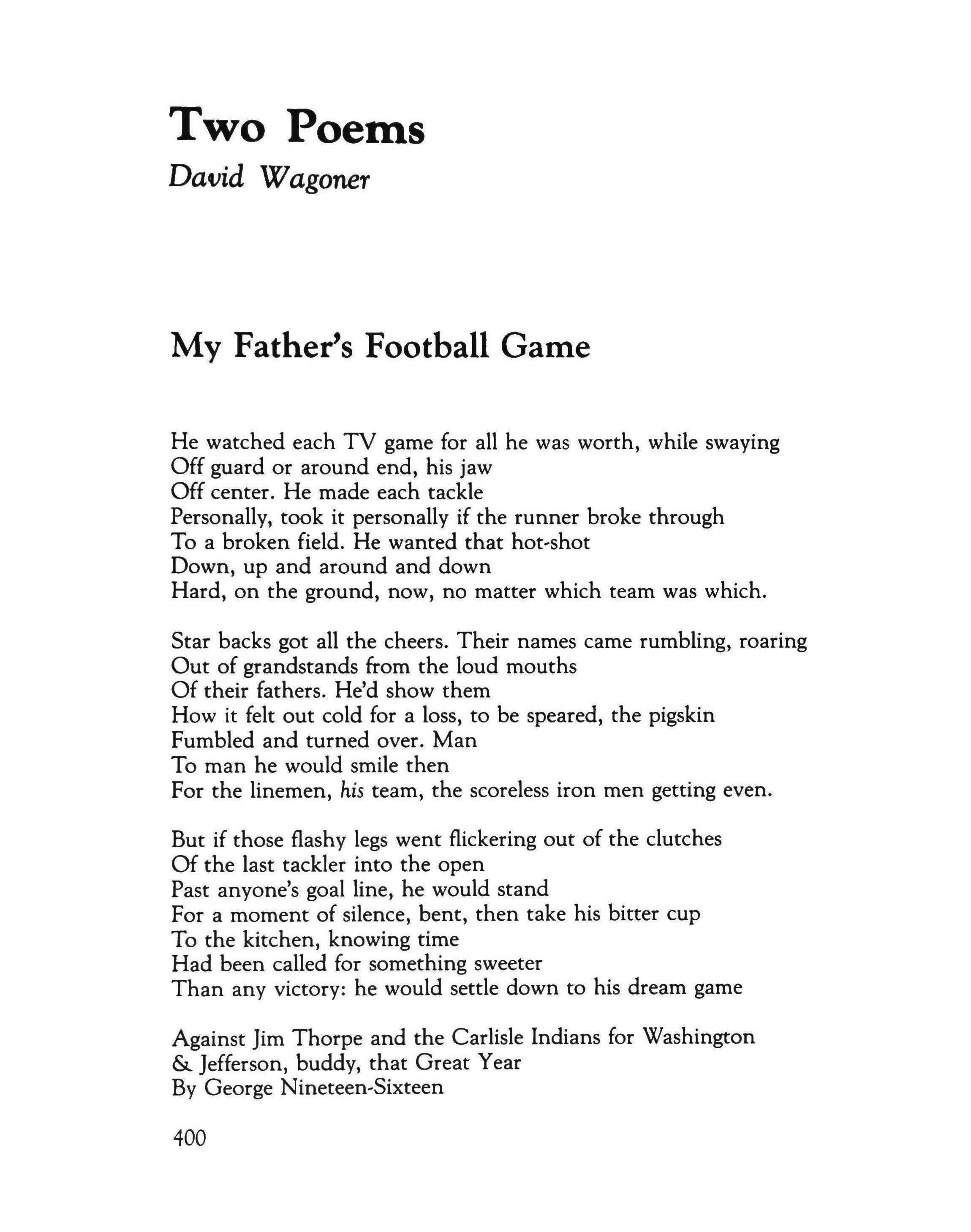
He watched each TV game for all he was worth, while swaying Off guard or around end, his jaw Off center. He made each tackle
Personally, took it personally if the runner broke through
To a broken field. He wanted that hot,shot Down, up and around and down Hard, on the ground, now, no matter which team was which.
Star backs got all the cheers. Their names came rumbling, roaring Out of grandstands from the loud mouths
Of their fathers. He'd show them
How it felt out cold for a loss, to be speared, the pigskin Fumbled and turned over. Man
To man he would smile then
For the linemen, his team, the scoreless iron men getting even.
But if those flashy legs went flickering out of the clutches
Of the last tackler into the open
Past anyone's goal line, he would stand
For a moment of silence, bent, then take his bitter cup
To the kitchen, knowing time Had been called for something sweeter
Than any victory: he would settle down to his dream game
Against Jim Thorpe and the Carlisle Indians for Washington & Jefferson, buddy, that Great Year
By George Nineteen-Sixteen
In mud, sweat, and sleet, in padding thinner than chain mail, With immortal guts and helmets
Flying, the Savages versus the Heroes
By failing light in a Gotterdammerung, Nothing to Nothing.

Out of the blackened mouth
Of the steel mill, ingots came
On flatcars, huge and glowing
From open-hearth crucibles
But dying from white to scarlet
To maroon in the black rain
Where suddenly they scattered
Their sparks like starbursts
Of shellfire or lightning strokes
Through the ashes of twilight.
I had to weigh those gods
On a scale in deadweight tons
Alone in a small cell
At night, where the blast of their heat
Through steam and safety glass
And firebrick against my skin
Withered me, forced me to turn
Away in awe and fear.
My father had fed the fire
Where they were born, had melted
And fused them slowly
Under his hard eye
And the judgment of his masters
From wreckage and iron ore,
Alloys and mysteries,
Had poured them into forms
That could shake the earth
Under me and did
As they passed by, still burning.
That earth was newly made And newly left for dead, Pounded and pile-driven
To an escape-proof island
402

to tunnel
On the shore of a dead lake
Not by creators of worlds
But makers of cinders, Cremators of dead gods
And fathers, surrounded By darkness and barbed-wire.
I walked on it one midnight
Through death by air, through death
By fire, through death by water
And earth where nothing grew
Under a searchlit glare
And a starless overcast
From the smoke of furnaces
Under my father's care
Past the guards at the gate
And their cold case'hardened faces, And finally out from under
Old orders I walked away,
Tearing my number off, Not daring to look back.
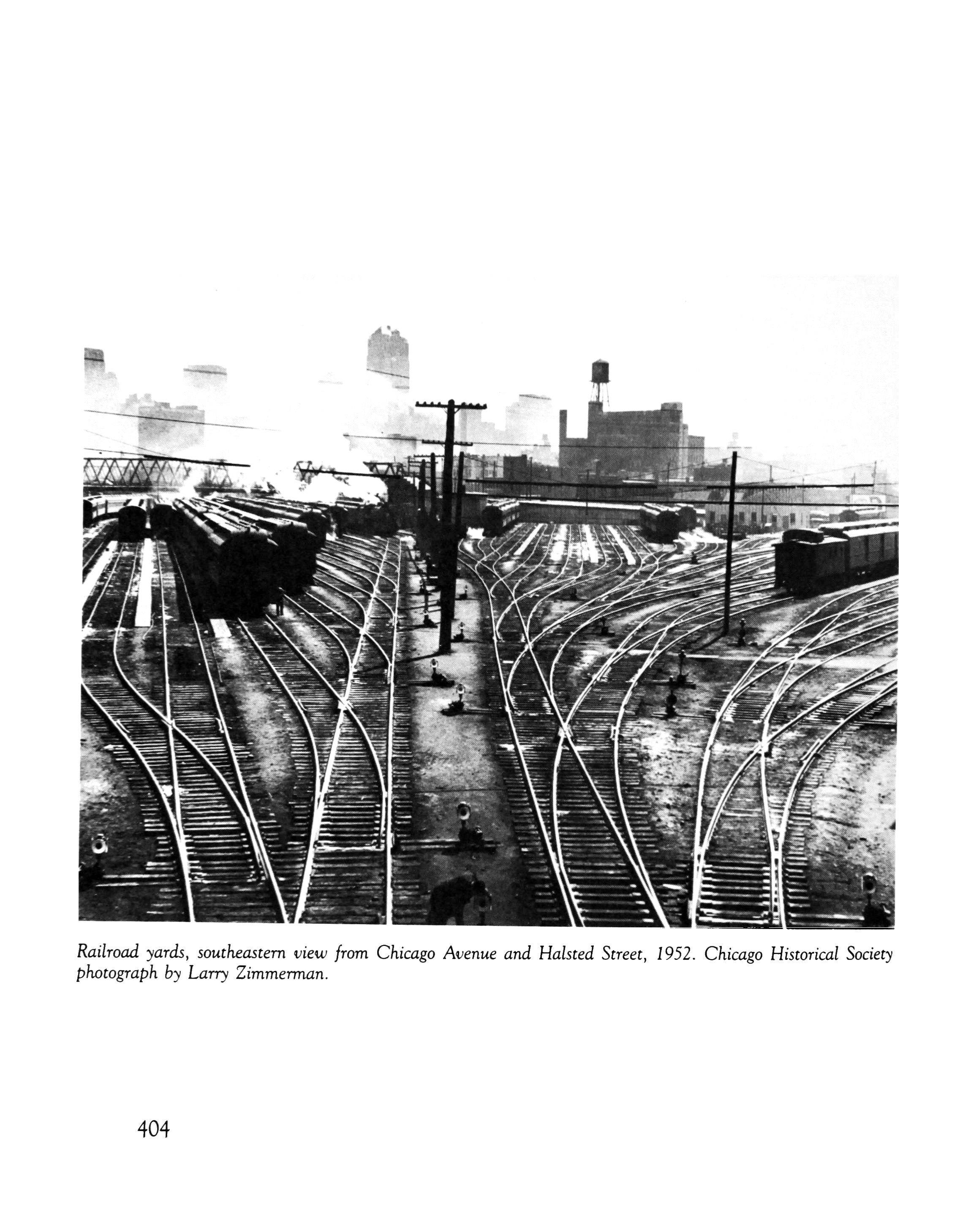
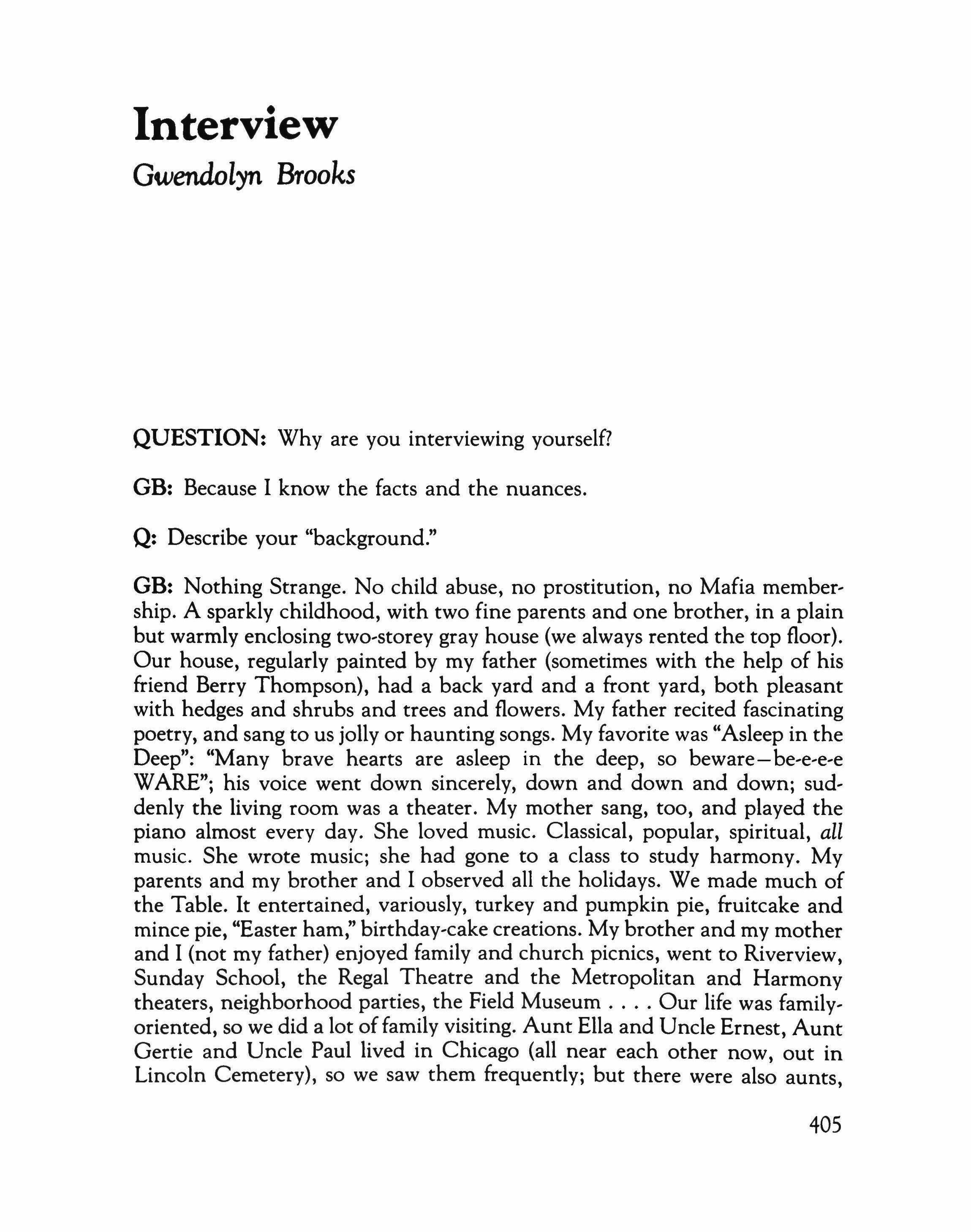
QUESTION: Why are you interviewing yourself?
GB: Because I know the facts and the nuances.
Q: Describe your "background."
GB: Nothing Strange. No child abuse, no prostitution, no Mafia member, ship. A sparkly childhood, with two fine parents and one brother, in a plain but warmly enclosing two-storey gray house (we always rented the top floor). Our house, regularly painted by my father (sometimes with the help of his friend Berry Thompson), had a back yard and a front yard, both pleasant with hedges and shrubs and trees and flowers. My father recited fascinating poetry, and sang to us jolly or haunting songs. My favorite was "Asleep in the Deep": "Many brave hearts are asleep in the deep, so beware-be-e-e-e WARE"; his voice went down sincerely, down and down and down; sud, denly the living room was a theater. My mother sang, too, and played the piano almost every day. She loved music. Classical, popular, spiritual, all music. She wrote music; she had gone to a class to study harmony. My parents and my brother and I observed all the holidays. We made much of the Table. It entertained, variously, turkey and pumpkin pie, fruitcake and mince pie, "Easter ham," birthday-cake creations. My brother and my mother and I (not my father) enjoyed family and church picnics, went to Riverview, Sunday School, the Regal Theatre and the Metropolitan and Harmony theaters, neighborhood parties, the Field Museum Our life was family, oriented, so we did a lot offamily visiting. Aunt Ella and Uncle Ernest, Aunt Gertie and Uncle Paul lived in Chicago (all near each other now, out in Lincoln Cemetery), so we saw them frequently; but there were also aunts,
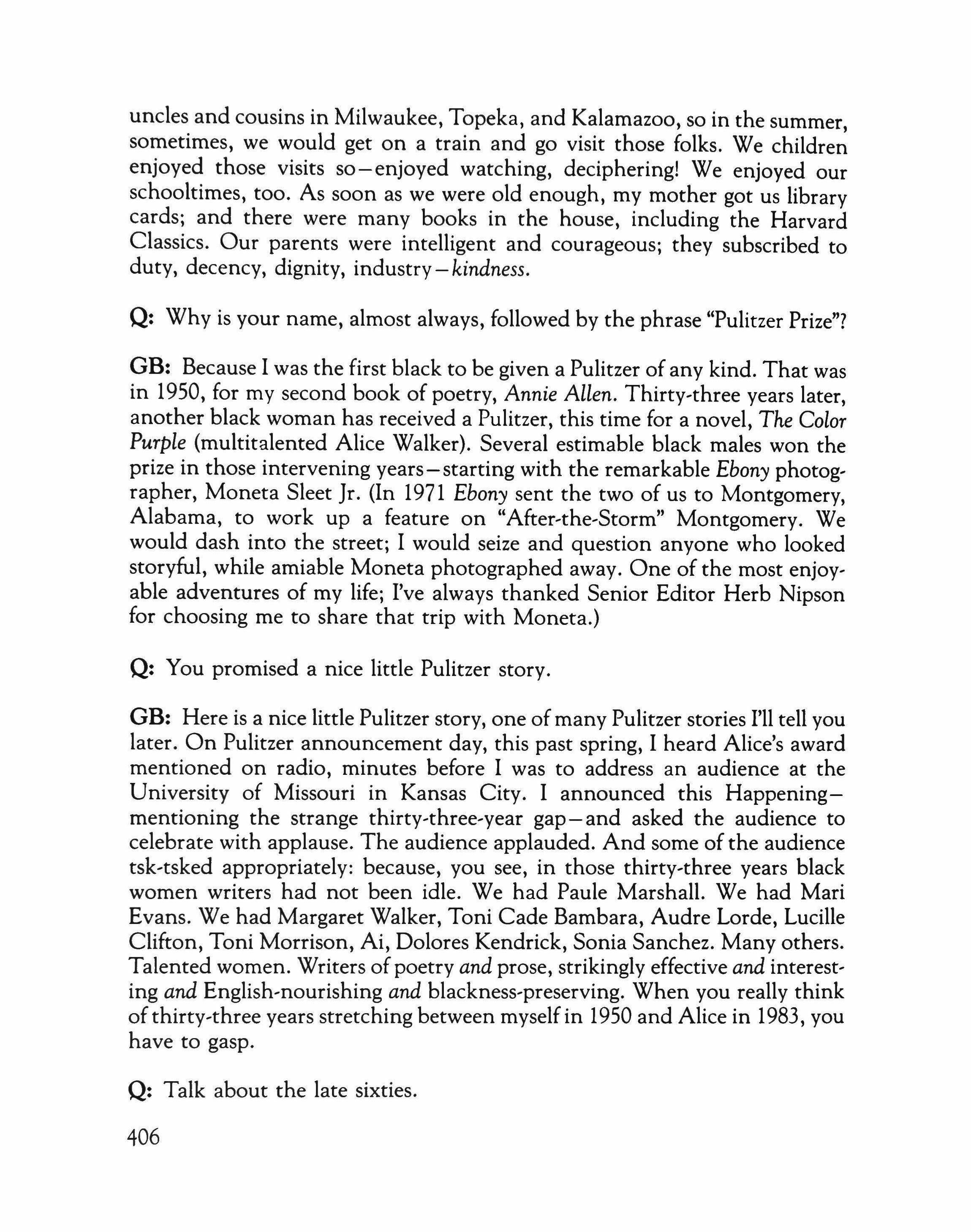
uncles and cousins in Milwaukee, Topeka, and Kalamazoo, so in the summer, sometimes, we would get on a train and go visit those folks. We children enjoyed those visits so - enjoyed watching, deciphering! We enjoyed our schooltimes, too. As soon as we were old enough, my mother got us library cards; and there were many books in the house, including the Harvard Classics. Our parents were intelligent and courageous; they subscribed to duty, decency, dignity, industry-kindness.
Q: Why is your name, almost always, followed by the phrase "Pulitzer Prize"?
GB: Because I was the first black to be given a Pulitzer of any kind. That was in 1950, for my second book of poetry, Annie Allen. Thirty-three years later, another black woman has received a Pulitzer, this time for a novel, The Color Purple (multitalented Alice Walker). Several estimable black males won the prize in those intervening years - starting with the remarkable Ebony photog, rapher, Moneta Sleet Jr. (In 1971 Ebony sent the two of us to Montgomery, Alabama, to work up a feature on "After-the-Storm" Montgomery. We would dash into the street; I would seize and question anyone who looked storvful, while amiable Moneta photographed away. One of the most enjoy, able adventures of my life; I've always thanked Senior Editor Herb Nipson for choosing me to share that trip with Moneta.)
Q: You promised a nice little Pulitzer story.
GB: Here is a nice little Pulitzer story, one of many Pulitzer stories I'll tell you later. On Pulitzer announcement day, this past spring, I heard Alice's award mentioned on radio, minutes before I was to address an audience at the University of Missouri in Kansas City. I announced this Happeningmentioning the strange thirty-three-year gap-and asked the audience to celebrate with applause. The audience applauded. And some of the audience tsk-tsked appropriately: because, you see, in those thirty-three years black women writers had not been idle. We had Paule Marshall. We had Mari Evans. We had Margaret Walker, Toni Cade Bambara, Audre Lorde, Lucille Clifton, Toni Morrison, Ai, Dolores Kendrick, Sonia Sanchez. Many others. Talented women. Writers of poetry and prose, strikingly effective and interest' ing and English-nourishing and blackness-preserving. When you really think ofthirty-three years stretching between myself in 1950 and Alice in 1983, you have to gasp.
Q: Talk about the late sixties.
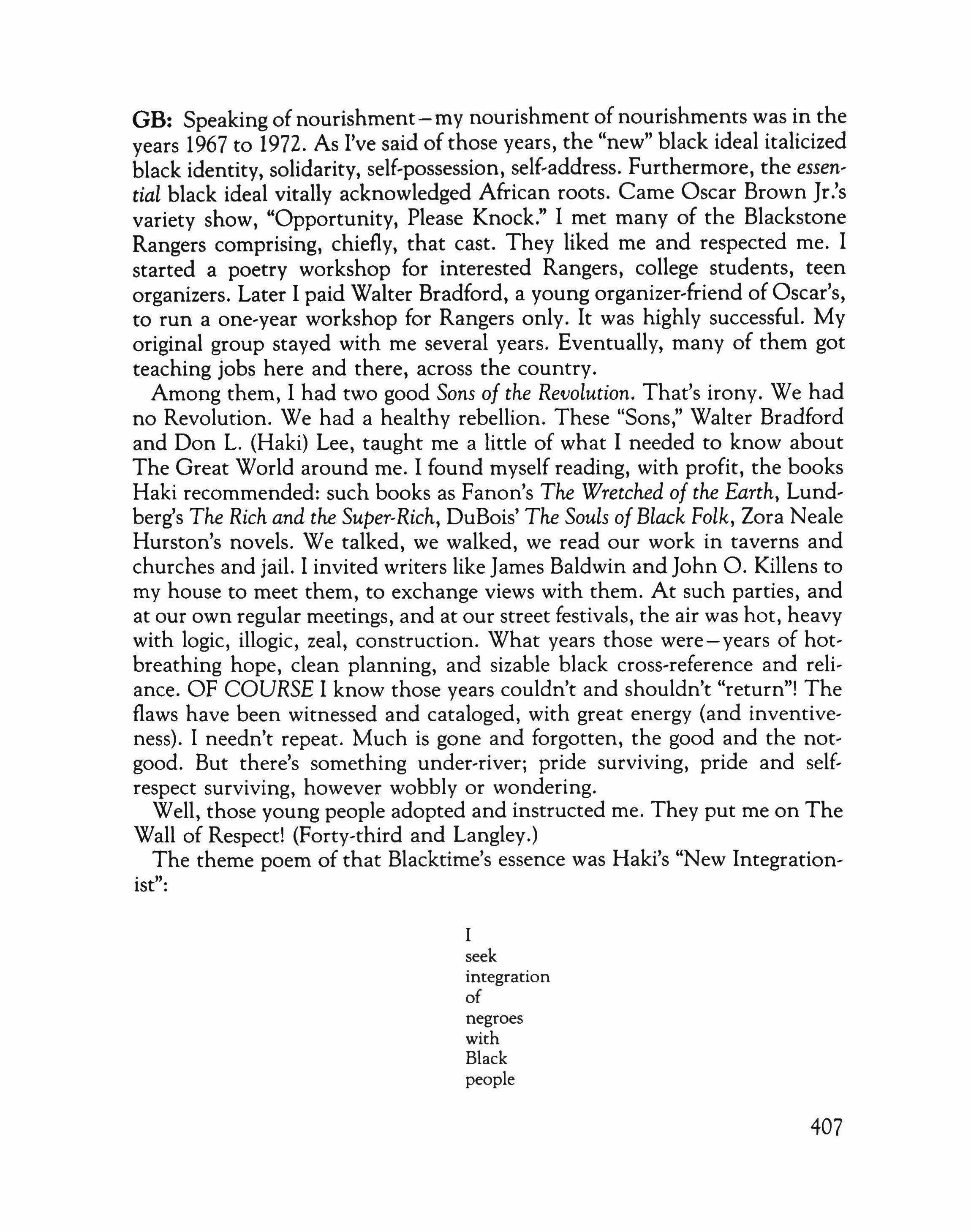
GB: Speaking ofnourishmentmy nourishment of nourishments was in the years 1967 to 1972. As I've said of those years, the "new" black ideal italicized black identity, solidarity, self-possession, self-address. Furthermore, the essen' tial black ideal vitally acknowledged African roots. Came Oscar Brown Jr.'s variety show, "Opportunity, Please Knock." I met many of the Blackstone Rangers comprising, chiefly, that cast. They liked me and respected me. I started a poetry workshop for interested Rangers, college students, teen organizers. Later I paid Walter Bradford, a young organizer-friend of Oscar's, to run a one-year workshop for Rangers only. It was highly successful. My original group stayed with me several years. Eventually, many of them got teaching jobs here and there, across the country.
Among them, I had two good Sons of the Revolution. That's irony. We had no Revolution. We had a healthy rebellion. These "Sons," Walter Bradford and Don L. (Haki) Lee, taught me a little of what I needed to know about The Great World around me. I found myself reading, with profit, the books Haki recommended: such books as Fanon's The Wretched of the Earth, Lund, berg's The Rich and the Super-Rich, DuBois' The Souls of Black Folk, Zora Neale Hurston's novels. We talked, we walked, we read our work in taverns and churches and jail. I invited writers like James Baldwin and John O. Killens to my house to meet them, to exchange views with them. At such parties, and at our own regular meetings, and at our street festivals, the air was hot, heavy with logic, illogic, zeal, construction. What years those were-years of hot, breathing hope, clean planning, and sizable black cross-reference and reliance. OF COURSE I know those years couldn't and shouldn't "return"! The flaws have been witnessed and cataloged, with great energy (and inventive, ness). I needn't repeat. Much is gone and forgotten, the good and the not, good. But there's something under-river; pride surviving, pride and self, respect surviving, however wobbly or wondering.
Well, those young people adopted and instructed me. They put me on The Wall of Respect! (Forty-third and Langley.)
The theme poem of that Blacktime's essence was Haki's "New Integration, ist": seek integration of negroes with Black people
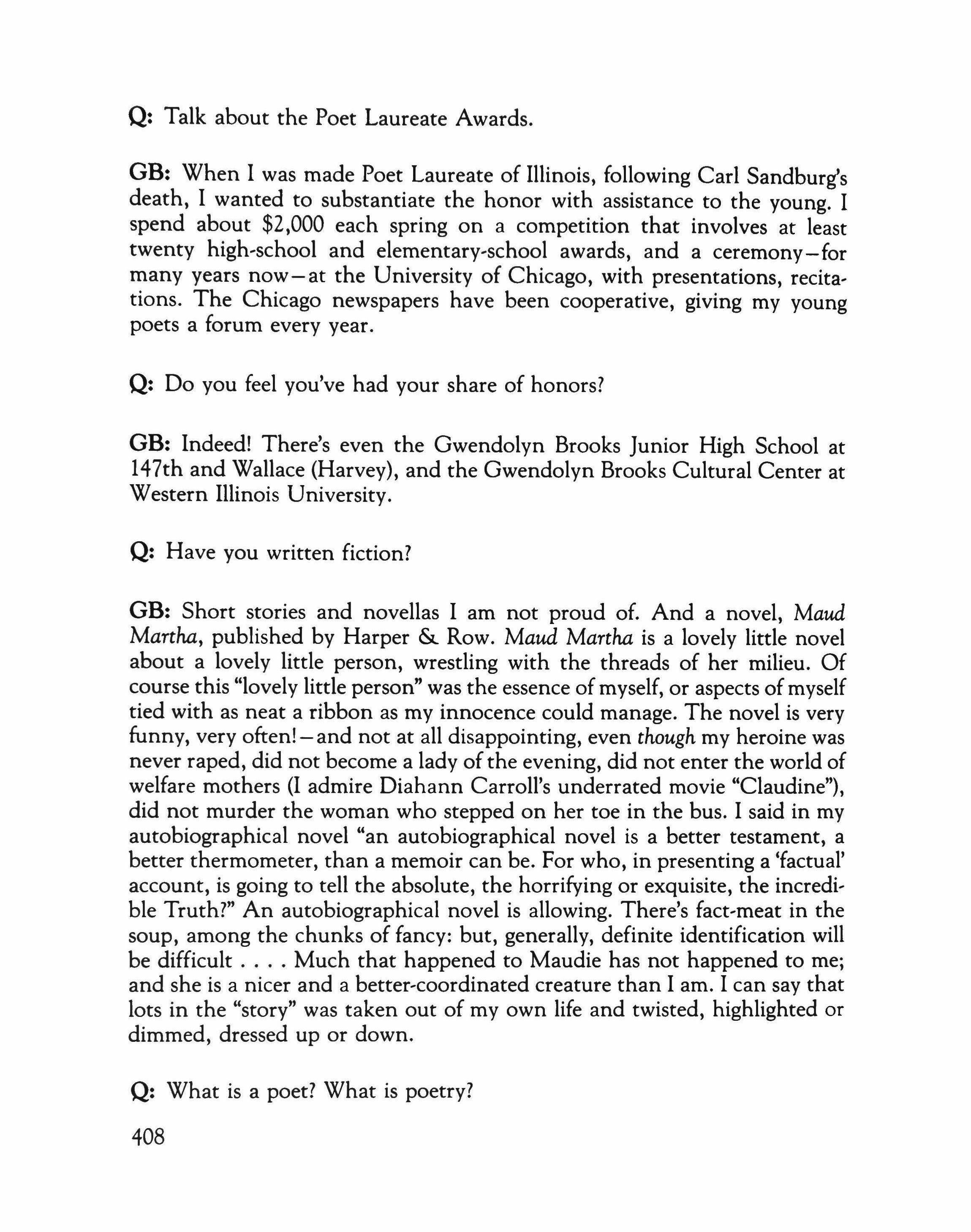
Q: Talk about the Poet Laureate Awards.
GB: When I was made Poet Laureate of Illinois, following Carl Sandburg's death, I wanted to substantiate the honor with assistance to the young. I spend about $2,000 each spring on a competition that involves at least twenty high-school and elementary-school awards, and a ceremony-for many years now-at the University of Chicago, with presentations, recitations. The Chicago newspapers have been cooperative, giving my young poets a forum every year.
Q: Do you feel you've had your share of honors?
GB: Indeed! There's even the Gwendolyn Brooks Junior High School at 147th and Wallace (Harvey), and the Gwendolyn Brooks Cultural Center at Western Illinois University.
Q: Have you written fiction?
GB: Short stories and novellas I am not proud of. And a novel, Maud Martha, published by Harper & Row. Maud Martha is a lovely little novel about a lovely little person, wrestling with the threads of her milieu. Of course this "lovely little person" was the essence ofmyself, or aspects ofmyself tied with as neat a ribbon as my innocence could manage. The novel is very funny, very often!-and not at all disappointing, even though my heroine was never raped, did not become a lady of the evening, did not enter the world of welfare mothers (I admire Diahann Carroll's underrated movie "Claudine"), did not murder the woman who stepped on her toe in the bus. I said in my autobiographical novel "an autobiographical novel is a better testament, a better thermometer, than a memoir can be. For who, in presenting a 'factual' account, is going to tell the absolute, the horrifying or exquisite, the incredible Truth?" An autobiographical novel is allowing. There's fact-meat in the soup, among the chunks of fancy: but, generally, definite identification will be difficult Much that happened to Maudie has not happened to me; and she is a nicer and a better-coordinated creature than I am. I can say that lots in the "story" was taken out of my own life and twisted, highlighted or dimmed, dressed up or down.
Q: What is a poet? What is poetry?
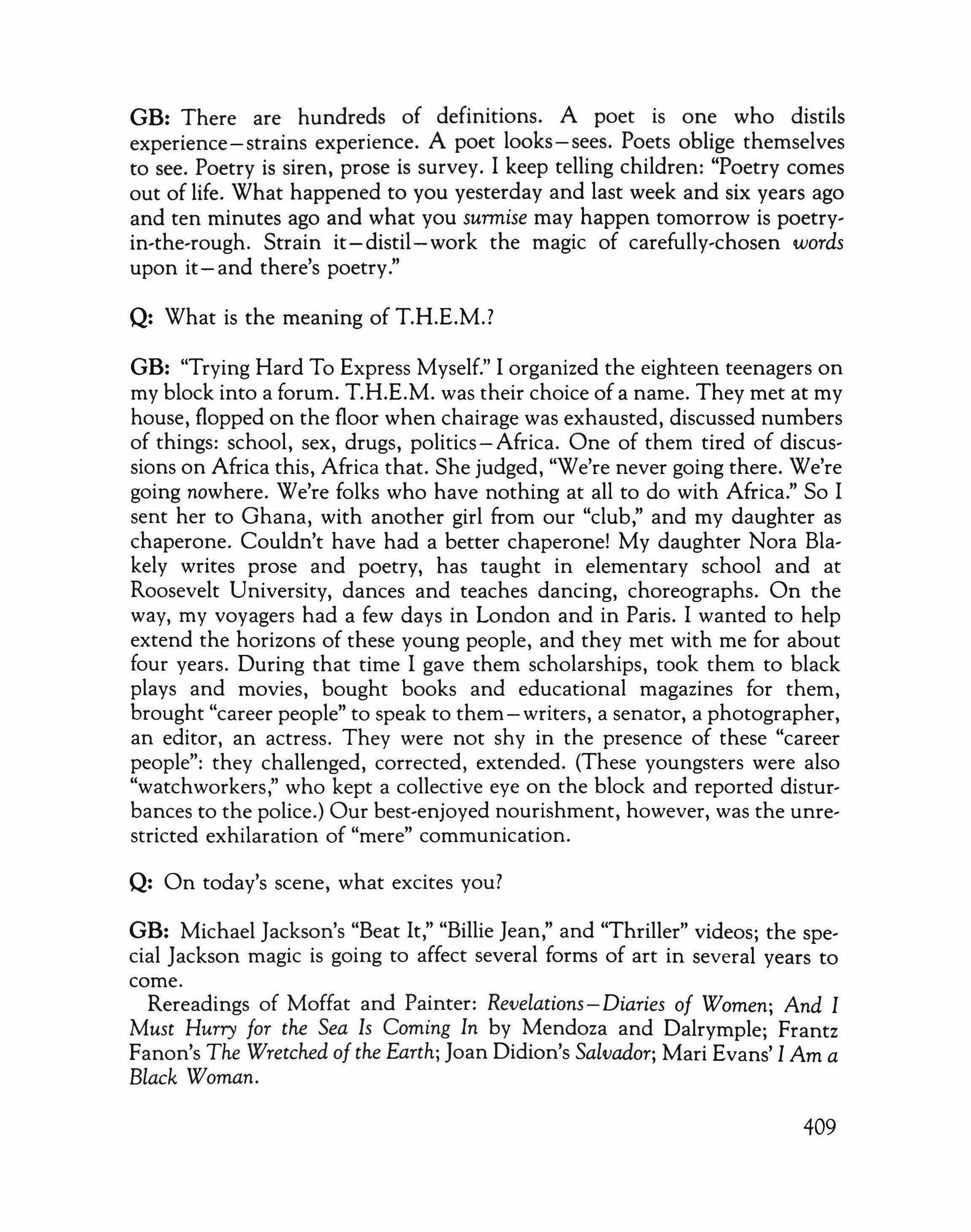
GB: There are hundreds of definitions. A poet is one who distils experience-strains experience. A poet looks-sees. Poets oblige themselves to see. Poetry is siren, prose is survey. I keep telling children: "Poetry comes out of life. What happened to you yesterday and last week and six years ago and ten minutes ago and what you surmise may happen tomorrow is poetryin-the-rough. Strain it-distil-work the magic of carefully-chosen words upon it-and there's poetry."
Q: What is the meaning of T.H.E.M.?
GB: "Trying Hard To Express Myself." I organized the eighteen teenagers on my block into a forum. T.H.E.M. was their choice of a name. They met at my house, flopped on the floor when chairage was exhausted, discussed numbers of things: school, sex, drugs, politics-Africa. One of them tired of discussions on Africa this, Africa that. She judged, "We're never going there. We're going nowhere. We're folks who have nothing at all to do with Africa." So I sent her to Ghana, with another girl from our "club," and my daughter as chaperone. Couldn't have had a better chaperone! My daughter Nora Blakely writes prose and poetry, has taught in elementary school and at Roosevelt University, dances and teaches dancing, choreographs. On the way, my voyagers had a few days in London and in Paris. I wanted to help extend the horizons of these young people, and they met with me for about four years. During that time I gave them scholarships, took them to black plays and movies, bought books and educational magazines for them, brought "career people" to speak to them-writers, a senator, a photographer, an editor, an actress. They were not shy in the presence of these "career people": they challenged, corrected, extended. (These youngsters were also "watchworkers," who kept a collective eye on the block and reported disrurbances to the police.) Our best-enjoyed nourishment, however, was the unrestricted exhilaration of "mere" communication.
Q: On today's scene, what excites you?
GB: Michael Jackson's "Beat It," "Billie Jean," and "Thriller" videos; the special Jackson magic is going to affect several forms of art in several years to come.
Rereadings of Moffat and Painter: Revelations-Diaries of Women; And I Must Hurry for the Sea Is Coming In by Mendoza and Dalrymple; Frantz Fanon's The Wretched of the Earth; Joan Didion's Salvador; Mari Evans' I Am a Black Woman.
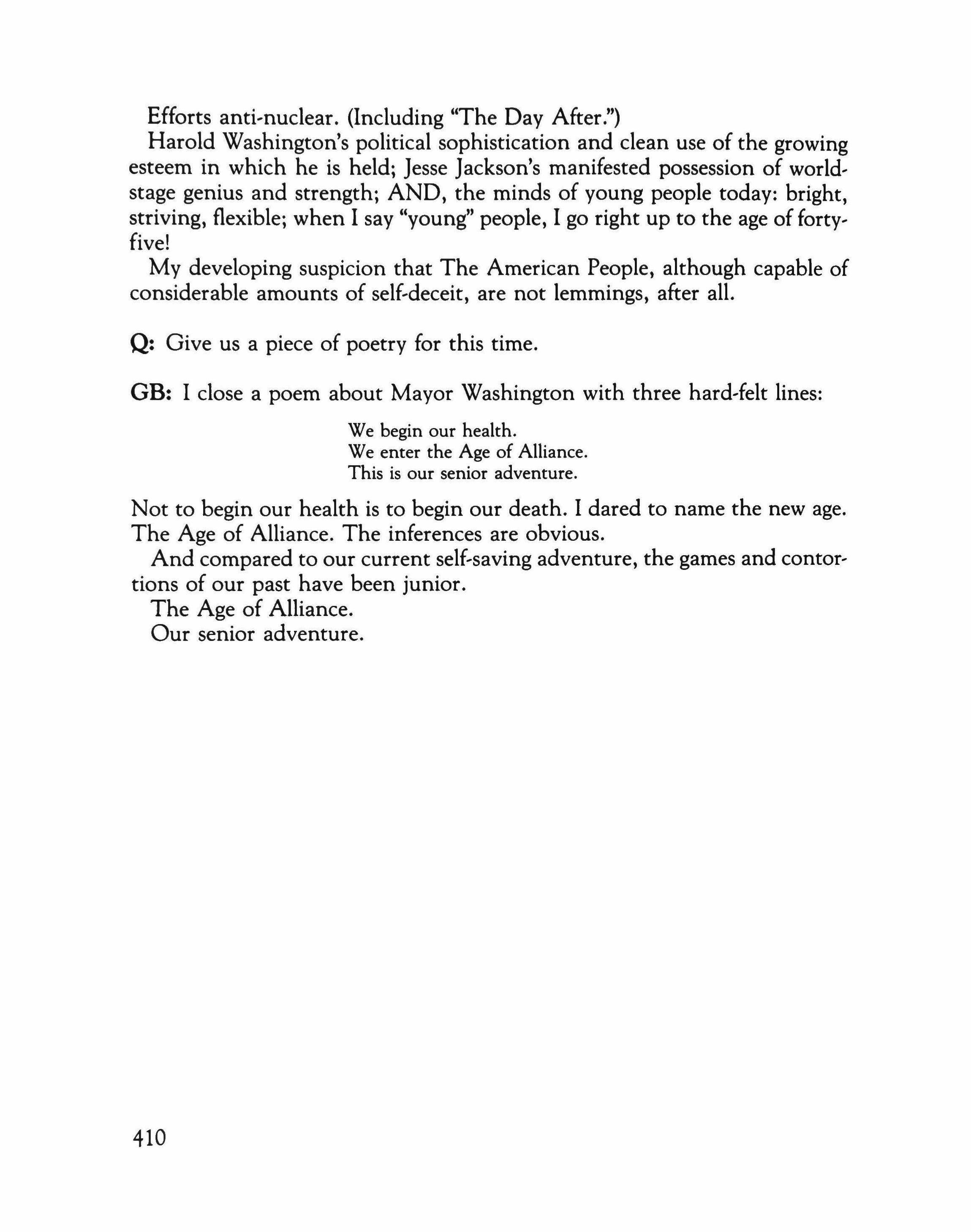
Efforts anti-nuclear. (Including "The Day After.")
Harold Washington's political sophistication and clean use of the growing esteem in which he is held; Jesse Jackson's manifested possession of worldstage genius and strength; AND, the minds of young people today: bright, striving, flexible; when I say "young" people, I go right up to the age of fortyfive!
My developing suspicion that The American People, although capable of considerable amounts of self-deceit, are not lemmings, after all.
Q: Give us a piece of poetry for this time.
GB: I close a poem about Mayor Washington with three hard-felt lines:
We begin our health. We enter the Age of Alliance. This is our senior adventure.
Not to begin our health is to begin our death. I dared to name the new age. The Age of Alliance. The inferences are obvious. And compared to our current self-saving adventure, the games and contortions of our past have been junior.
The Age of Alliance.
Our senior adventure.
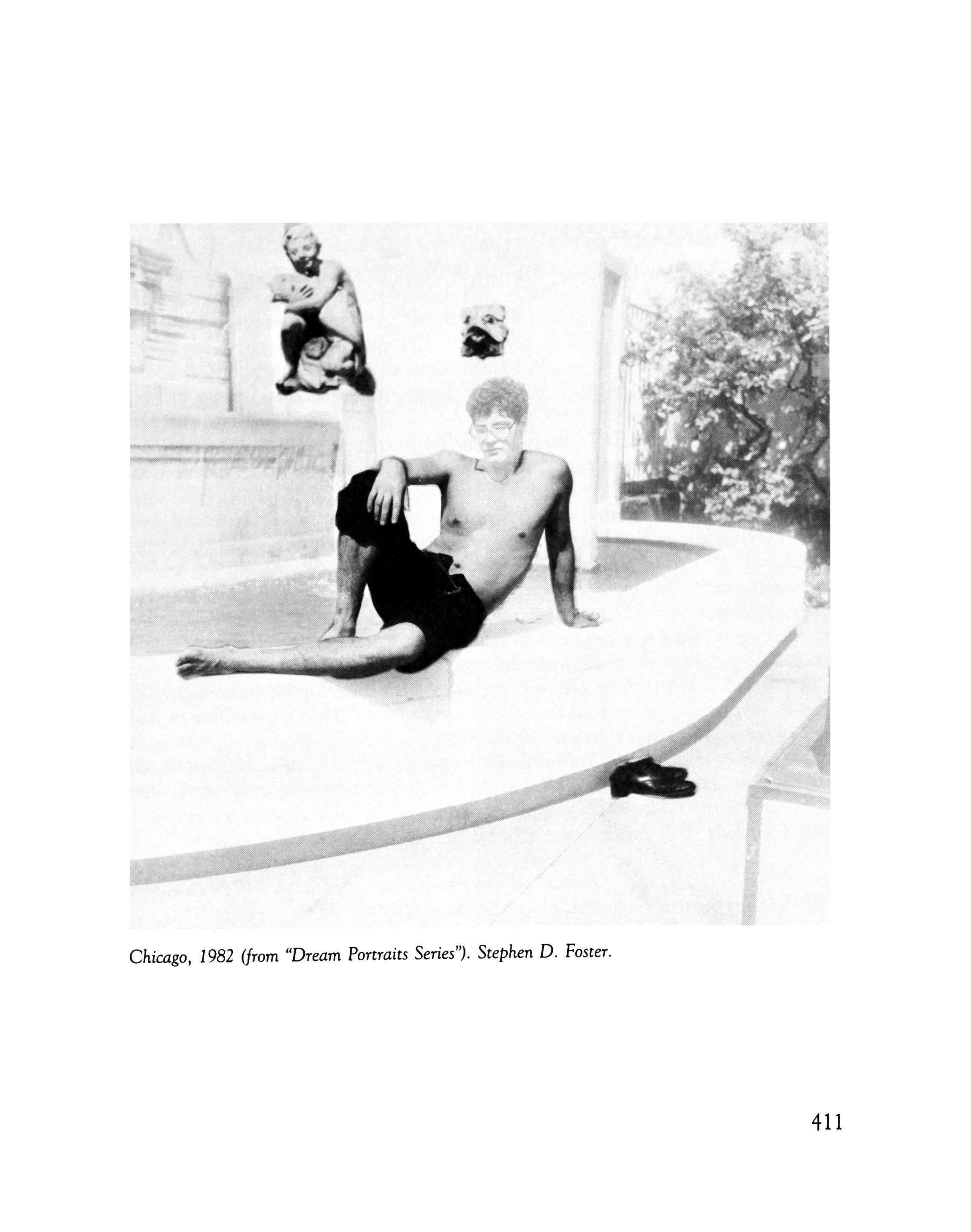
Chicago, 1982 (from
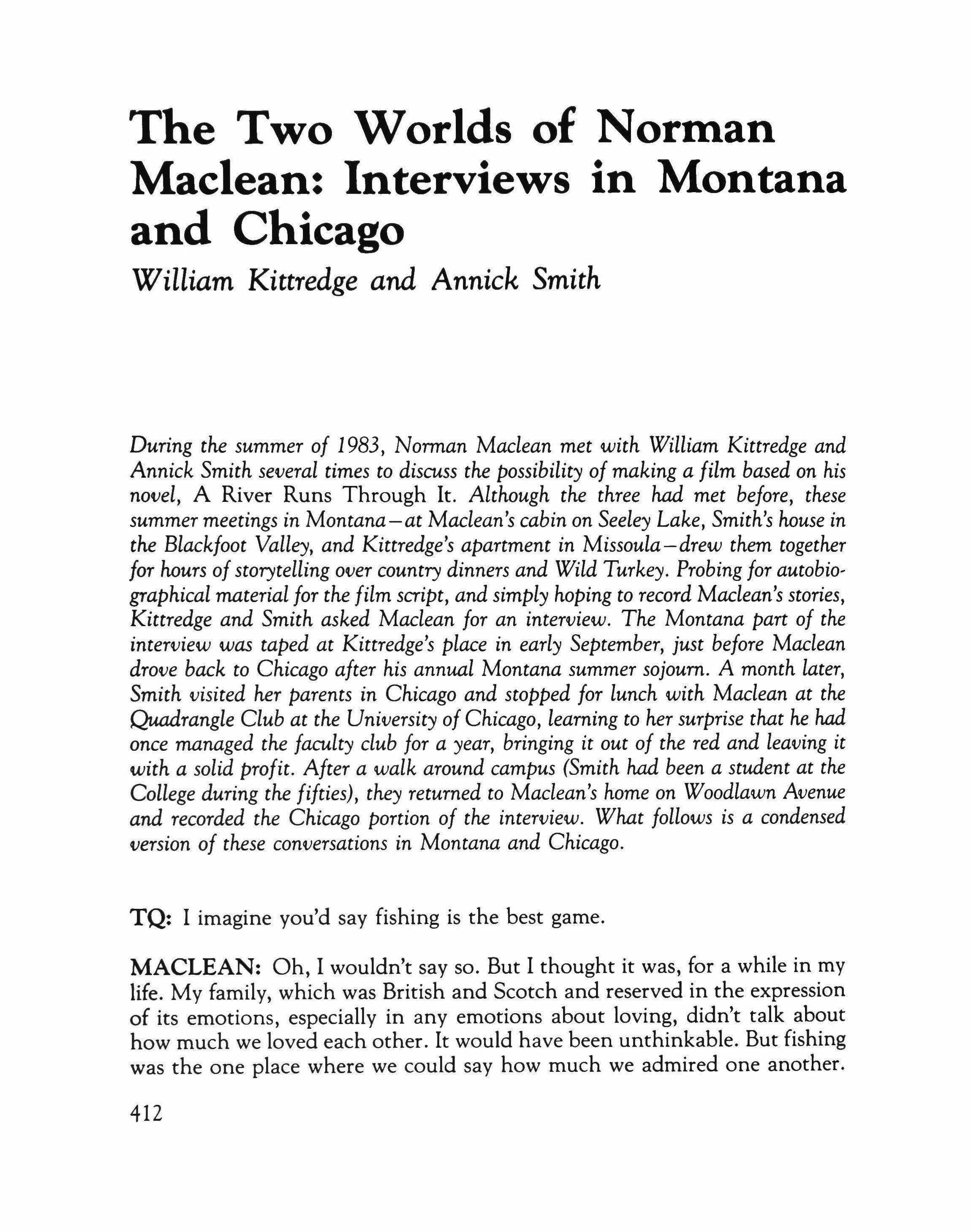
During the summer of 1983, Norman Maclean met with William Kittredge and Annick Smith several times to discuss the possibility ofmaking a film based on his novel, A River Runs Through It. Although the three had met before, these summer meetings in Montana-at Maclean's cabin on Seeley Lake, Smith's house in the Blackfoot Valley, and Kittredge's apartment in Missoula-drew them together for hours ofstorytelling over country dinners and Wild Turkey. Probing for autobiographical material for the film script, and simply hoping to record Maclean's stories, Kittredge and Smith asked Maclean for an interview. The Montana part of the interview was taped at Kittredge's place in early September, just before Maclean drove back to Chicago after his annual Montana summer sojourn. A month later, Smith visited her parents in Chicago and stopped for lunch with Maclean at the Quadrangle Club at the University ofChicago, learning to her surprise that he had once managed the faculty club for a year, bringing it out of the red and leaving it with a solid profit. After a walk around campus (Smith had been a student at the College during the fifties), they returned to Maclean's home on Woodlawn Avenue and recorded the Chicago portion of the interview. What follows is a condensed version of these conversations in Montana and Chicago.
TQ: I imagine you'd say fishing is the best game.
MACLEAN: Oh, I wouldn't say so. But I thought it was, for a while in my life. My family, which was British and Scotch and reserved in the expression of its emotions, especially in any emotions about loving, didn't talk about how much we loved each other. It would have been unthinkable. But fishing was the one place where we could say how much we admired one another.

We could also talk about how much we didn't like some things. I'd tell my brother, "Ah, you played that fish like a Chinaman-God Almighty."
I couldn't think ofsaying such a thing to him normally. Fishing is where we all opened our hearts, including my mother. And I think that's the greatest thing that fishing still does. Now I fish alone, but I don't fish the best water any more; I fish where I used to fish with my brother, where my brother and I fished as a family-when I go fishing it's a memorial to my family. So I don't fish alone. Fishing in our family was science, religion, and grace-and rhythm was very important. Somehow the universe is rhythmical. When you're good you get in touch with the universe by catching its rhythms. My father taught me to cast on a four-count beat, with a metronome. I wasn't kidding when I said that in my family there was no clear line between religion and fly fishing.
My father had a great sense of artistry. If you made beauty you had it made with my Protestant father. He played with grace, with the word itself. It always had some kind of religious implication, even if it was nothing more than graceful casting. He thought that was a kind of religious manifestation. My father preached twice on Sunday and he would be all wound up after his morning service and I would walk with him. When we lived on the north side of Missoula we'd walk up to the waterworks reservoir on the hill, or maybe up Rattlesnake Creek. When we lived across the Clark Fork we'd walk up the Milwaukee Railroad tracks to Spring Gulch. And he used to say to me, "Son, I want you to know that when you get old enough to go to college, I'll have enough money saved so that you can go to any college in the world that you're able to get into." I cannot tell you what that assurance did to my character. He made $1,800 a year and what he saved, he saved out of that. His saying what he and my mother were going to do for me was one of the most important things in my life.
TQ: So you could go to Dartmouth if you wanted.
MACLEAN: But I almost started out at Harvard.
TQ: But you were seriously considering devoting your life to being a forest ranger.
MACLEAN: My father did not allow me to start elementary school but taught me himself. Most everything crucial that happened to me since has been influenced by his teaching. He was a very stern teacher, very harsh. He
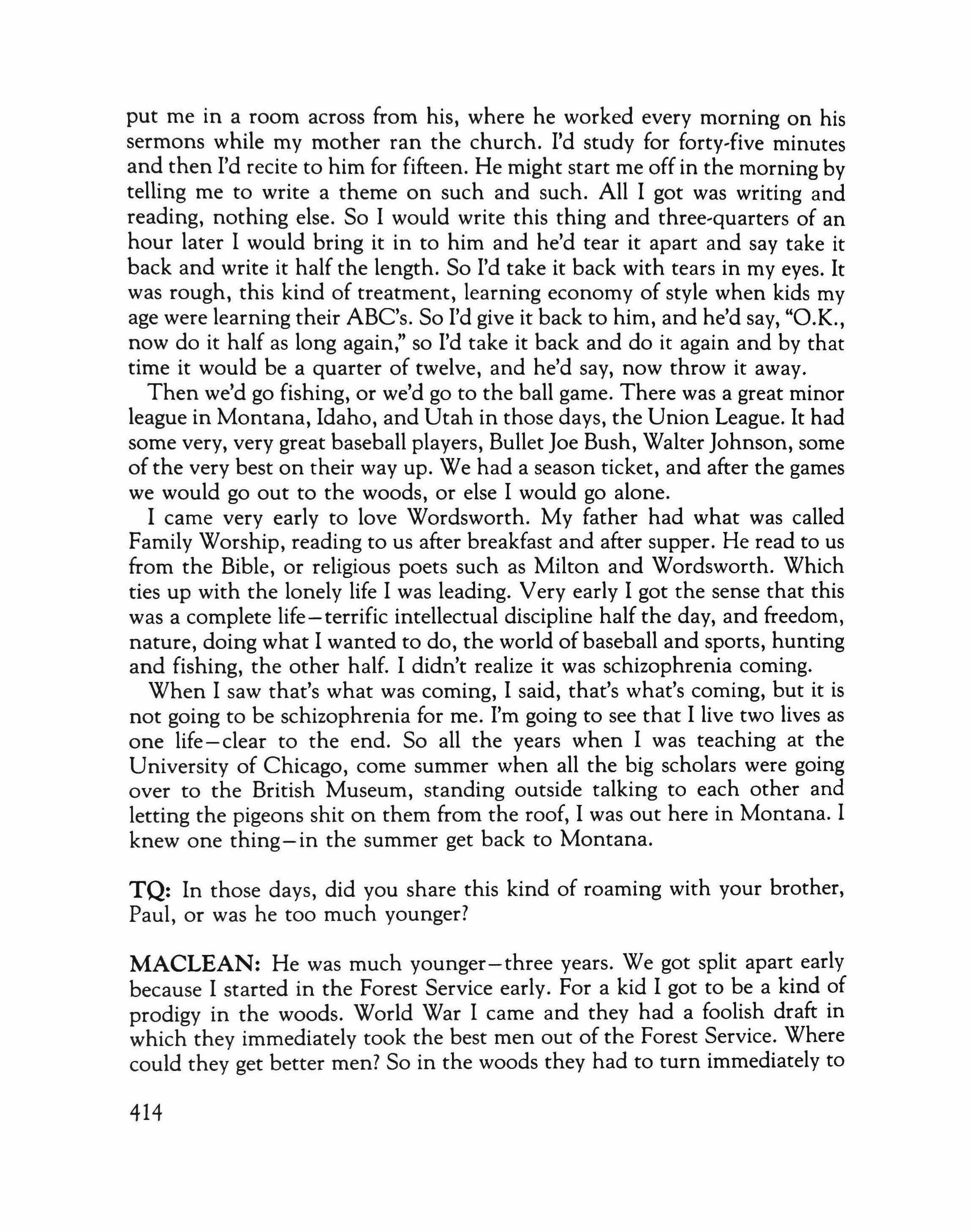
put me in a room across from his, where he worked every morning on his sermons while my mother ran the church. I'd study for forty-five minutes and then I'd recite to him for fifteen. He might start me off in the morning by telling me to write a theme on such and such. All I got was writing and reading, nothing else. So I would write this thing and three-quarters of an hour later I would bring it in to him and he'd tear it apart and say take it back and write it half the length. So I'd take it back with tears in my eyes. It was rough, this kind of treatment, learning economy of style when kids my age were learning their ABC's. So I'd give it back to him, and he'd say, "O.K., now do it half as long again," so I'd take it back and do it again and by that time it would be a quarter of twelve, and he'd say, now throw it away. Then we'd go fishing, or we'd go to the ball game. There was a great minor league in Montana, Idaho, and Utah in those days, the Union League. It had some very, very great baseball players, Bullet Joe Bush, Walter Johnson, some of the very best on their way up. We had a season ticket, and after the games we would go out to the woods, or else I would go alone.
I came very early to love Wordsworth. My father had what was called Family Worship, reading to us after breakfast and after supper. He read to us from the Bible, or religious poets such as Milton and Wordsworth. Which ties up with the lonely life I was leading. Very early I got the sense that this was a complete life-terrific intellectual discipline half the day, and freedom, nature, doing what I wanted to do, the world ofbaseball and sports, hunting and fishing, the other half. I didn't realize it was schizophrenia coming.
When I saw that's what was coming, I said, that's what's coming, but it is not going to be schizophrenia for me. I'm going to see that I live two lives as one life-clear to the end. So all the years when I was teaching at the University of Chicago, come summer when all the big scholars were going over to the British Museum, standing outside talking to each other and letting the pigeons shit on them from the roof, I was out here in Montana. I knew one thing - in the summer get back to Montana.
TQ: In those days, did you share this kind of roaming with your brother, Paul, or was he too much younger?
MACLEAN: He was much younger-three years. We got split apart early because I started in the Forest Service early. For a kid I got to be a kind of prodigy in the woods. World War I came and they had a foolish draft in which they immediately took the best men out of the Forest Service. Where could they get better men? So in the woods they had to turn immediately to

old bastards or young punks like me. When I was fourteen I was working way over on the Selway and the Lochsa, a couple of the worst spots in the Northwest. And I worked for the Forest Service through my undergraduate years and my first two years of teaching at Dartmouth-right up until I got a job at the University of Chicago.
That was my last year in the woods for the Forest Service, and when I came out I was kind of mature, but I made a miscalculation. I thought the work was going always to be horses and walking. I'd lose twenty or twenty-five pounds every summer, and end up weighing only 125 pounds. I'd look at myself in the mirror and my cheeks were just big hollows. And I thought, here I am, in this shape when I'm young and tough. If I keep this up, it's going to kill me. But as it turned out, pretty soon they had a road up every gulch, and they had four-wheel drives and helicopters and Christ knows what else. You can't go from your office to your toilet in the Forest Service now - unless you go in a jeep.
I just figured I better quit while I could.
TQ: Why, then, after two years of teaching at Dartmouth, did you leave school and come back to the Forest Service in Helena? After you thought you'd quit that life for good?
MACLEAN: My father was a strange and wonderful guy. He allowed me great freedom, but he must have known a lot about me. He let me go my own way, which is very Scotch in the most elevated sense. He knew that as a teacher what you wanted to do was make your student independent of yourself.
My father never asked me about how things were going at Dartmouth, and I never made much comment, but after my second year of teaching there, when I came back, he said to me in a kind of offhand way, "I don't think you've learned much this year." And that really sunk me, because I knew it was true. That year I'd kept on hanging around with some poker-playing pals who still hadn't graduated. I had made quite a reputation as a teacher, but I didn't admire myself.
That was late August, and I thought, "Christ, I didn't learn anything this year. And I don't see where I'm going." So I wrote the chairman of the English Department, who was a great admirer of mine-must have been the eighth or tenth of September-and I asked if he could get somebody to take my classes, because I didn't think I ought to go back any more. And I told him why.
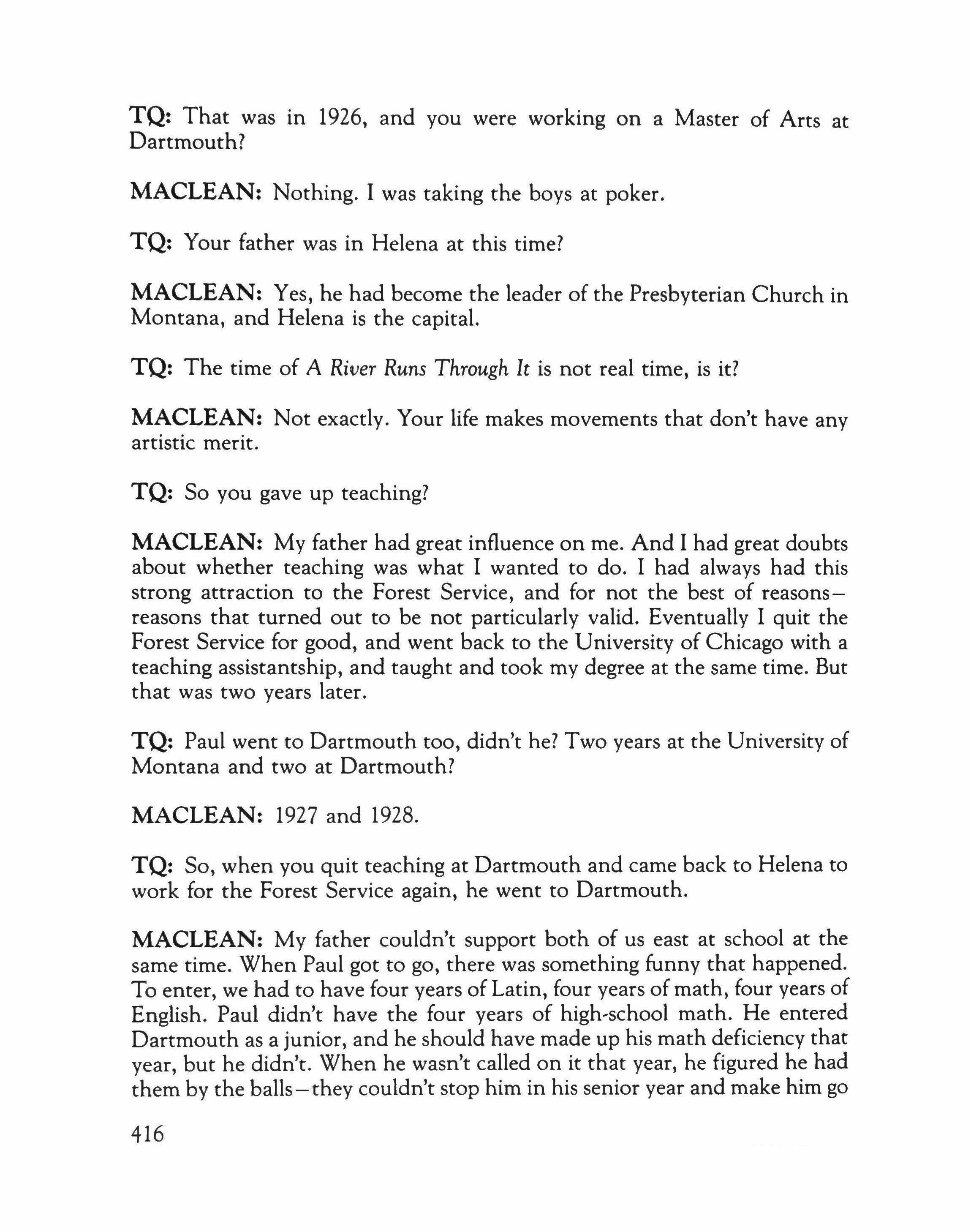
TQ: That was in 1926, and you were working on a Master of Arts at Dartmouth?
MACLEAN: Nothing. I was taking the boys at poker.
TQ: Your father was in Helena at this time?
MACLEAN: Yes, he had become the leader of the Presbyterian Church in Montana, and Helena is the capital.
TQ: The time of A River Runs Through It is not real time, is it?
MACLEAN: Not exactly. Your life makes movements that don't have any artistic merit.
TQ: So you gave up teaching?
MACLEAN: My father had great influence on me. And I had great doubts about whether teaching was what I wanted to do. I had always had this strong attraction to the Forest Service, and for not the best of reasonsreasons that turned out to be not particularly valid. Eventually I quit the Forest Service for good, and went back to the University of Chicago with a teaching assistantship, and taught and took my degree at the same time. But that was two years later.
TQ: Paul went to Dartmouth too, didn't he? Two years at the University of Montana and two at Dartmouth?
MACLEAN: 1927 and 1928.
TQ: So, when you quit teaching at Dartmouth and came back to Helena to work for the Forest Service again, he went to Dartmouth.
MACLEAN: My father couldn't support both of us east at school at the same time. When Paul got to go, there was something funny that happened. To enter, we had to have four years of Latin, four years of math, four years of English. Paul didn't have the four years of high-school math. He entered Dartmouth as a junior, and he should have made up his math deficiency that year, but he didn't. When he wasn't called on it that year, he figured he had them by the balls - they couldn't stop him in his senior year and make him go 416
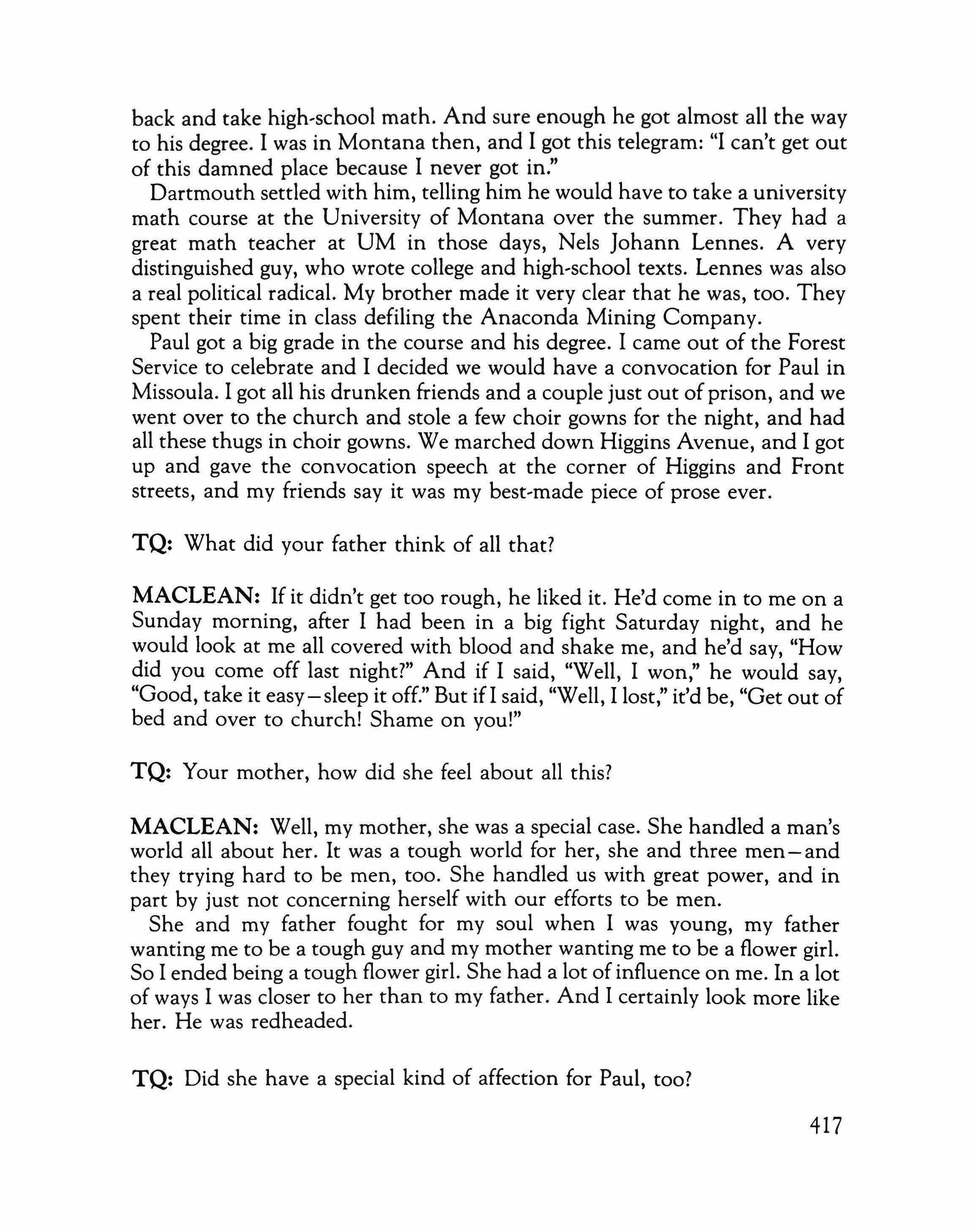
back and take high-school math. And sure enough he got almost all the way to his degree. I was in Montana then, and I got this telegram: "I can't get out of this damned place because I never got in."
Dartmouth settled with him, telling him he would have to take a university math course at the University of Montana over the summer. They had a great math teacher at UM in those days, Nels Johann Lennes. A very distinguished guy, who wrote college and high-school texts. Lennes was also a real political radical. My brother made it very clear that he was, too. They spent their time in class defiling the Anaconda Mining Company.
Paul got a big grade in the course and his degree. I came out of the Forest Service to celebrate and I decided we would have a convocation for Paul in Missoula. I got all his drunken friends and a couple just out ofprison, and we went over to the church and stole a few choir gowns for the night, and had all these thugs in choir gowns. We marched down Higgins Avenue, and I got up and gave the convocation speech at the corner of Higgins and Front streets, and my friends say it was my best-made piece of prose ever.
TQ: What did your father think of all that?
MACLEAN: If it didn't get too rough, he liked it. He'd come in to me on a Sunday morning, after I had been in a big fight Saturday night, and he would look at me all covered with blood and shake me, and he'd say, "How did you come off last night?" And if I said, "Well, I won," he would say, "Good, take it easy-sleep it off." But if! said, "Well, I lost," it'd be, "Get out of bed and over to church! Shame on you!"
TQ: Your mother, how did she feel about all this?
MACLEAN: Well, my mother, she was a special case. She handled a man's world all about her. It was a tough world for her, she and three men-and they trying hard to be men, too. She handled us with great power, and in part by just not concerning herself with our efforts to be men.
She and my father fought for my soul when I was young, my father wanting me to be a tough guy and my mother wanting me to be a flower girl. So I ended being a tough flower girl. She had a lot of influence on me. In a lot of ways I was closer to her than to my father. And I certainly look more like her. He was redheaded.
TQ: Did she have a special kind of affection for Paul, too?
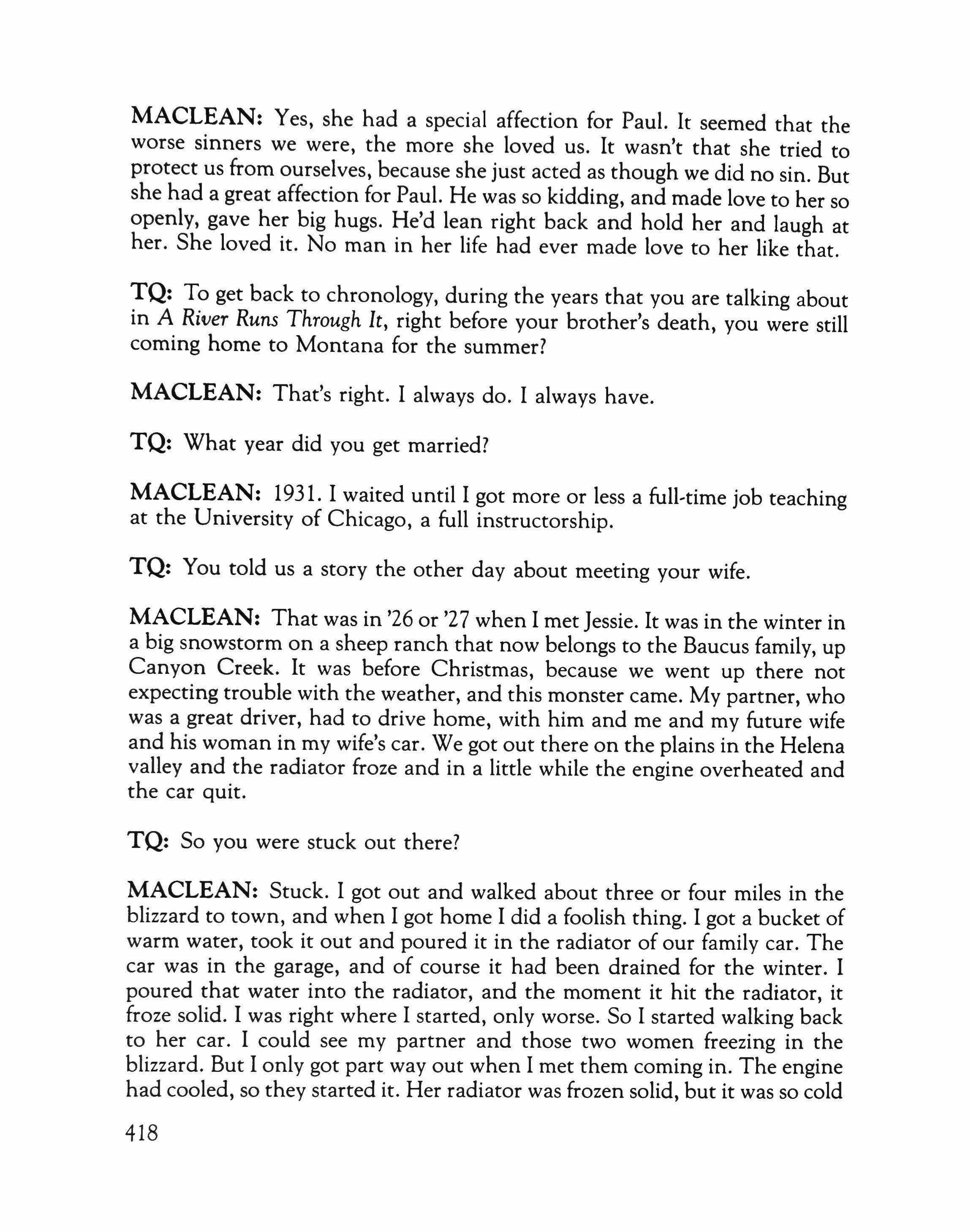
MACLEAN: Yes, she had a special affection for Paul. It seemed that the worse sinners we were, the more she loved us. It wasn't that she tried to protect us from ourselves, because she just acted as though we did no sin. But she had a great affection for Paul. He was so kidding, and made love to her so openly, gave her big hugs. He'd lean right back and hold her and laugh at her. She loved it. No man in her life had ever made love to her like that.
TQ: To get back to chronology, during the years that you are talking about in A River Runs Through It, right before your brother's death, you were still coming home to Montana for the summer?
MACLEAN: That's right. I always do. I always have.
TQ: What year did you get married?
MACLEAN: 1931. I waited until I got more or less a full-time job teaching at the University of Chicago, a full instructorship.
TQ: You told us a story the other day about meeting your wife.
MACLEAN: That was in '26 or '27 when I met Jessie. It was in the winter in a big snowstorm on a sheep ranch that now belongs to the Baucus family, up Canyon Creek. It was before Christmas, because we went up there not expecting trouble with the weather, and this monster came. My partner, who was a great driver, had to drive home, with him and me and my future wife and his woman in my wife's car. We got out there on the plains in the Helena valley and the radiator froze and in a little while the engine overheated and the car quit.
TQ: So you were stuck out there?
MACLEAN: Stuck. I got out and walked about three or four miles in the blizzard to town, and when I got home I did a foolish thing. I got a bucket of warm water, took it out and poured it in the radiator of our family car. The car was in the garage, and of course it had been drained for the winter. I poured that water into the radiator, and the moment it hit the radiator, it froze solid. I was right where I started, only worse. So I started walking back to her car. I could see my partner and those two women freezing in the blizzard. But I only got part way out when I met them coming in. The engine had cooled, so they started it. Her radiator was frozen solid, but it was so cold
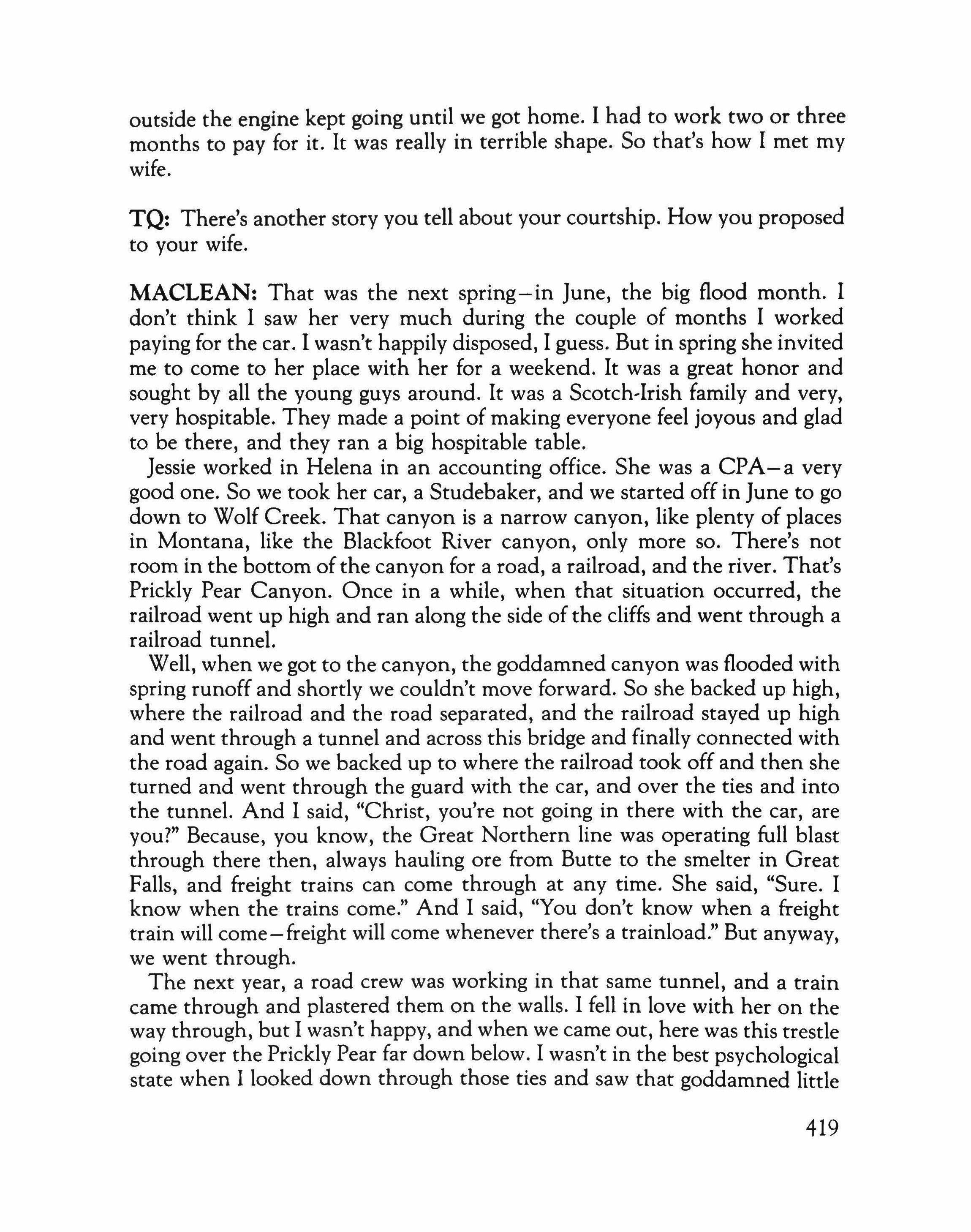
outside the engine kept going until we got home. I had to work two or three months to pay for it. It was really in terrible shape. So that's how I met my wife.
TQ: There's another story you tell about your courtship. How you proposed to your wife.
MACLEAN: That was the next spring-in june, the big flood month. I don't think I saw her very much during the couple of months I worked paying for the car. I wasn't happily disposed, I guess. But in spring she invited me to come to her place with her for a weekend. It was a great honor and sought by all the young guys around. It was a Scotch-Irish family and very, very hospitable. They made a point of making everyone feel joyous and glad to be there, and they ran a big hospitable table.
jessie worked in Helena in an accounting office. She was a CPA-a very good one. So we took her car, a Studebaker, and we started off in june to go down to Wolf Creek. That canyon is a narrow canyon, like plenty of places in Montana, like the Blackfoot River canyon, only more so. There's not room in the bottom ofthe canyon for a road, a railroad, and the river. That's Prickly Pear Canyon. Once in a while, when that situation occurred, the railroad went up high and ran along the side of the cliffs and went through a railroad tunnel.
Well, when we got to the canyon, the goddamned canyon was flooded with spring runoff and shortly we couldn't move forward. So she backed up high, where the railroad and the road separated, and the railroad stayed up high and went through a tunnel and across this bridge and finally connected with the road again. So we backed up to where the railroad took off and then she turned and went through the guard with the car, and over the ties and into the tunnel. And I said, "Christ, you're not going in there with the car, are you?" Because, you know, the Great Northern line was operating full blast through there then, always hauling ore from Butte to the smelter in Great Falls, and freight trains can come through at any time. She said, "Sure. I know when the trains come." And I said, "You don't know when a freight train will come-freight will come whenever there's a trainload." But anyway, we went through.
The next year, a road crew was working in that same tunnel, and a train came through and plastered them on the walls. I fell in love with her on the way through, but I wasn't happy, and when we came out, here was this trestle going over the Prickly Pear far down below. I wasn't in the best psychological state when I looked down through those ties and saw that goddamned little

silvery trickle. It seemed a mile away. We drove across that trestle and almost immediately afterwards we connected again with the main road. So she got back on the main road and stopped her motor. I told her, "You know, I'm pretty impressed with the way you drive that car. Some day I might ask you to marry me." And she said, "Well, you better get used to high places before you do."
TQ: You said she was Irish?
MACLEAN: Scotch-Irish. Her mother was a Scot from Nova Scotia, and her father was an Irishman.
TQ: What did they do? Were they ranchers?
MACLEAN: No, they ran the big store. It sold everything and was the only store in town.
TQ: How long after that did you propose to her?
MACLEAN: Not too long. I was really impressed. She always had that offhand reckless style. I'd say, "I don't know if we've got enough money to do something or other." She'd say, "How much do we have in the bank?" So I'd 11 h "w' " d h id "If 'I" te er, eve got some, an s e sal, we ve got some, we ve got p enty.
TQ: How did she get along with Paul?
MACLEAN: They respected one another and became great friends. Paul was working on the Helena paper. In those days there were two Helena papers, an evening and a daily paper, both owned by the ACM, and he worked on both. They had a wonderful tough editor name of Bill Campbell, a famous tough son of a bitch, a great vitriolic writer who specialized in castrating the members of the Helena congregation. Every day he'd cut the balls off somebody. My brother liked that. So my brother and Bill Campbell were very close and admired each other greatly, while everybody in town hated them.
They depended heavily on their families, as such guys often do. With all their brutality, they were very tender to their families, and depended heavily on the support and tenderness of the family since they got nothing from the outside world which resembled warmth and admiration. There was a big
streak of the adversary in my brother. He was taking on the world all the time, and so was Campbell. It was their great joy.
TQ: Do you think that accounts for Paul's gambling?
MACLEAN: I don't really know. I think there are things you allow yourself and your family that are beyond human understanding. But I don't think
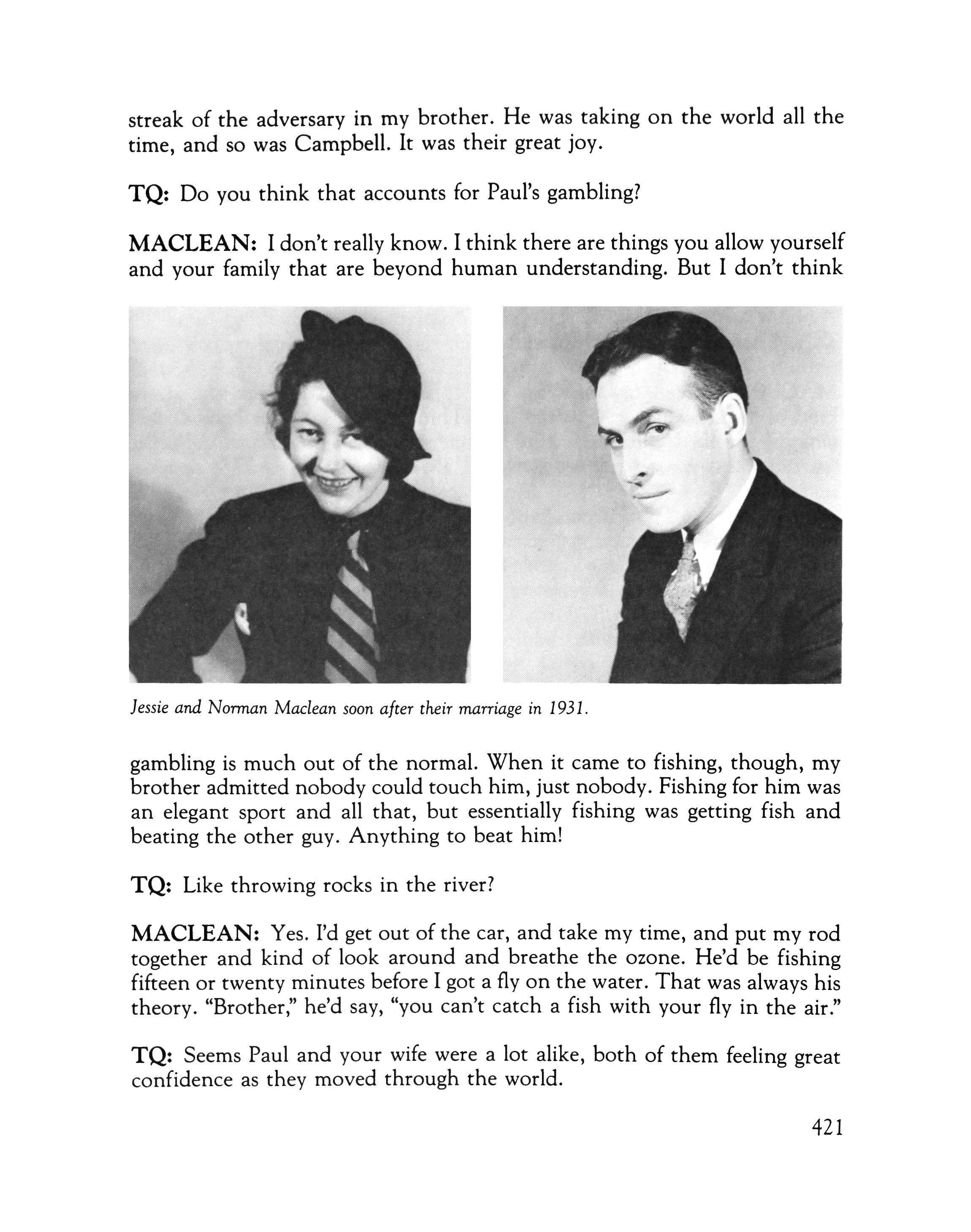
gambling is much out of the normal. When it came to fishing, though, my brother admitted nobody could touch him, just nobody. Fishing for him was an elegant sport and all that, but essentially fishing was getting fish and beating the other guy. Anything to beat him!
TQ: Like throwing rocks in the river?
MACLEAN: Yes. I'd get out of the car, and take my time, and put my rod together and kind of look around and breathe the ozone. He'd be fishing fifteen or twenty minutes before I got a fly on the water. That was always his theory. "Brother," he'd say, "you can't catch a fish with your fly in the air."
TQ: Seems Paul and your wife were a lot alike, both of them feeling great confidence as they moved through the world.
Jessie and Norman Maclean soon after their marriage in 1931.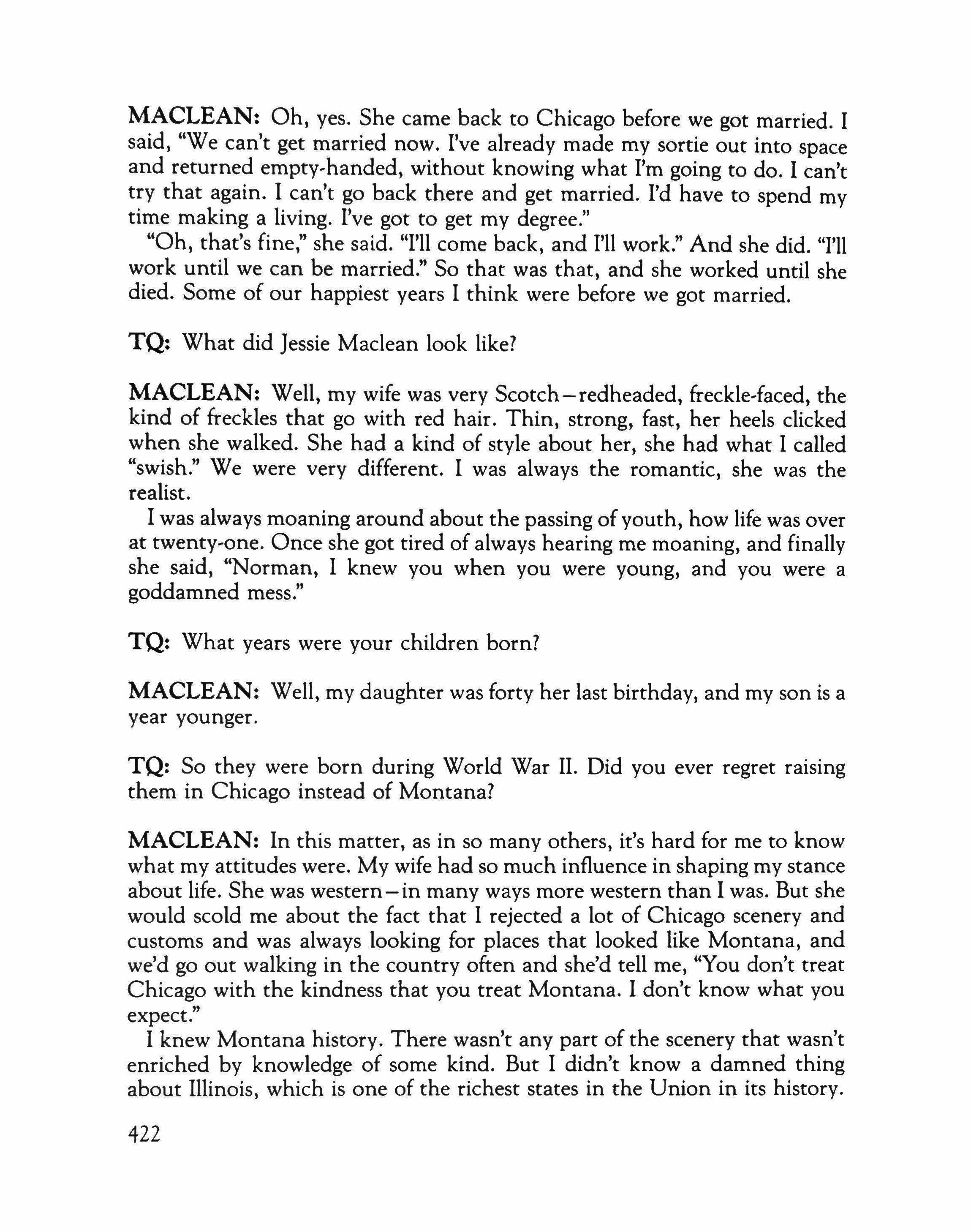
MACLEAN: Oh, yes. She came back to Chicago before we got married. I said, "We can't get married now. I've already made my sortie out into space and returned empty-handed, without knowing what I'm going to do. I can't try that again. I can't go back there and get married. I'd have to spend my time making a living. I've got to get my degree."
"Oh, that's fine," she said. "I'll come back, and I'll work." And she did. "I'll work until we can be married." So that was that, and she worked until she died. Some of our happiest years I think were before we got married.
TQ: What did Jessie Maclean look like?
MACLEAN: Well, my wife was very Scotch-redheaded, freckle-faced, the kind of freckles that go with red hair. Thin, strong, fast, her heels clicked when she walked. She had a kind of style about her, she had what I called "swish." We were very different. I was always the romantic, she was the realist.
I was always moaning around about the passing ofyouth, how life was over at twenty-one. Once she got tired of always hearing me moaning, and finally she said, "Norman, I knew you when you were young, and you were a goddamned mess."
TQ: What years were your children born?
MACLEAN: Well, my daughter was forty her last birthday, and my son is a year younger.
TQ: So they were born during World War II. Did you ever regret raising them in Chicago instead of Montana?
MACLEAN: In this matter, as in so many others, it's hard for me to know what my attitudes were. My wife had so much influence in shaping my stance about life. She was western - in many ways more western than I was. But she would scold me about the fact that I rejected a lot of Chicago scenery and customs and was always looking for places that looked like Montana, and we'd go out walking in the country often and she'd tell me, "You don't treat Chicago with the kindness that you treat Montana. I don't know what you expect."
I knew Montana history. There wasn't any part of the scenery that wasn't enriched by knowledge of some kind. But I didn't know a damned thing about Illinois, which is one of the richest states in the Union in its history.
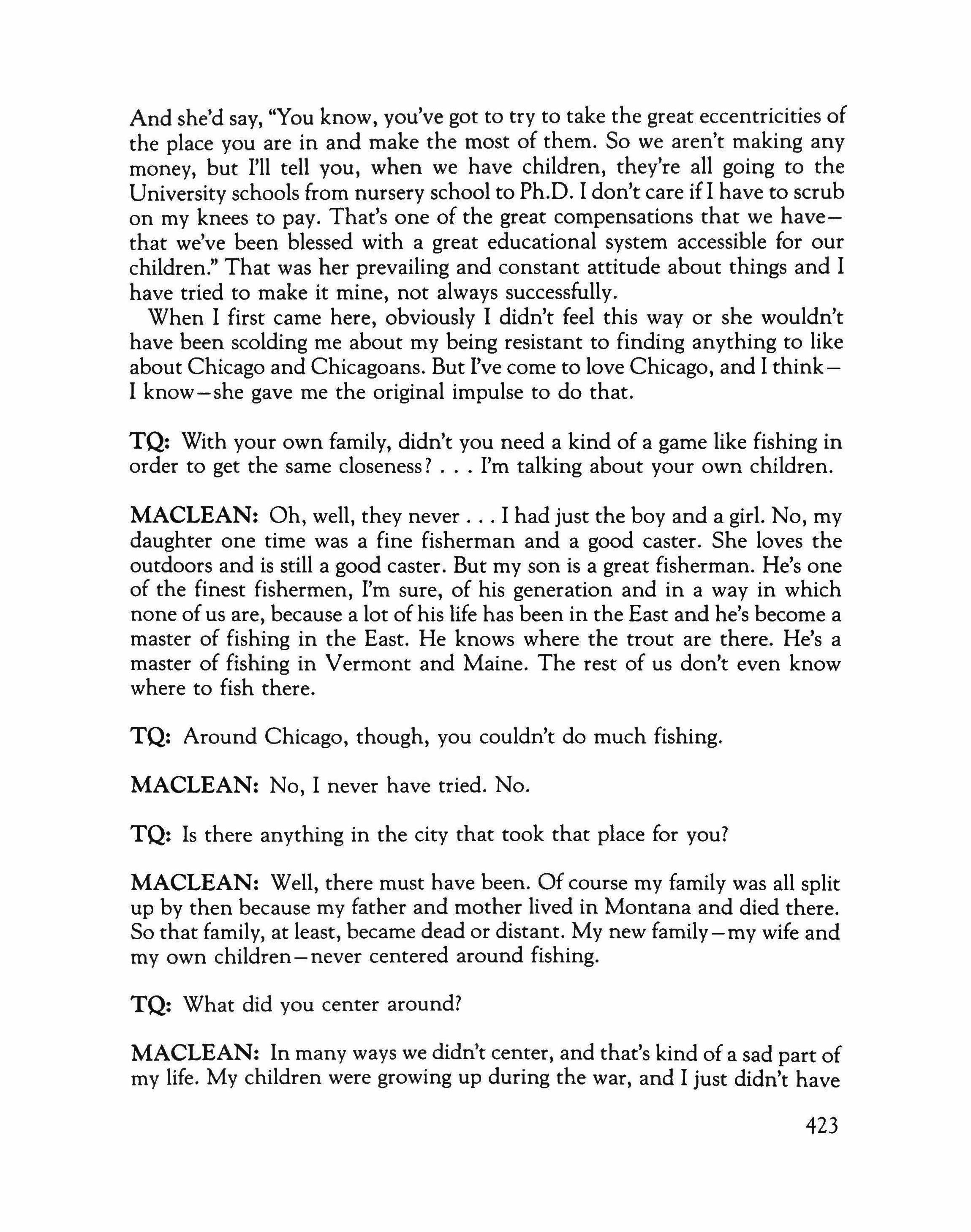
And she'd say, "You know, you've got to try to take the great eccentricities of the place you are in and make the most of them. So we aren't making any money, but I'll tell you, when we have children, they're all going to the University schools from nursery school to Ph.D. I don't care if! have to scrub on my knees to pay. That's one of the great compensations that we havethat we've been blessed with a great educational system accessible for our children." That was her prevailing and constant attitude about things and I have tried to make it mine, not always successfully.
When I first carne here, obviously I didn't feel this way or she wouldn't have been scolding me about my being resistant to finding anything to like about Chicago and Chicagoans. But I've corne to love Chicago, and I thinkI know - she gave me the original impulse to do that.
TQ: With your own family, didn't you need a kind of a game like fishing in order to get the same closeness? I'm talking about your own children.
MACLEAN: Oh, well, they never I had just the boy and a girl. No, my daughter one time was a fine fisherman and a good caster. She loves the outdoors and is still a good caster. But my son is a great fisherman. He's one of the finest fishermen, I'm sure, of his generation and in a way in which none of us are, because a lot of his life has been in the East and he's become a master of fishing in the East. He knows where the trout are there. He's a master of fishing in Vermont and Maine. The rest of us don't even know where to fish there.
TQ: Around Chicago, though, you couldn't do much fishing.
MACLEAN: No, I never have tried. No.
TQ: Is there anything in the city that took that place for you?
MACLEAN: Well, there must have been. Of course my family was all split up by then because my father and mother lived in Montana and died there. So that family, at least, became dead or distant. My new family-my wife and my own children-never centered around fishing.
TQ: What did you center around?
MACLEAN: In many ways we didn't center, and that's kind of a sad part of my life. My children were growing up during the war, and I just didn't have
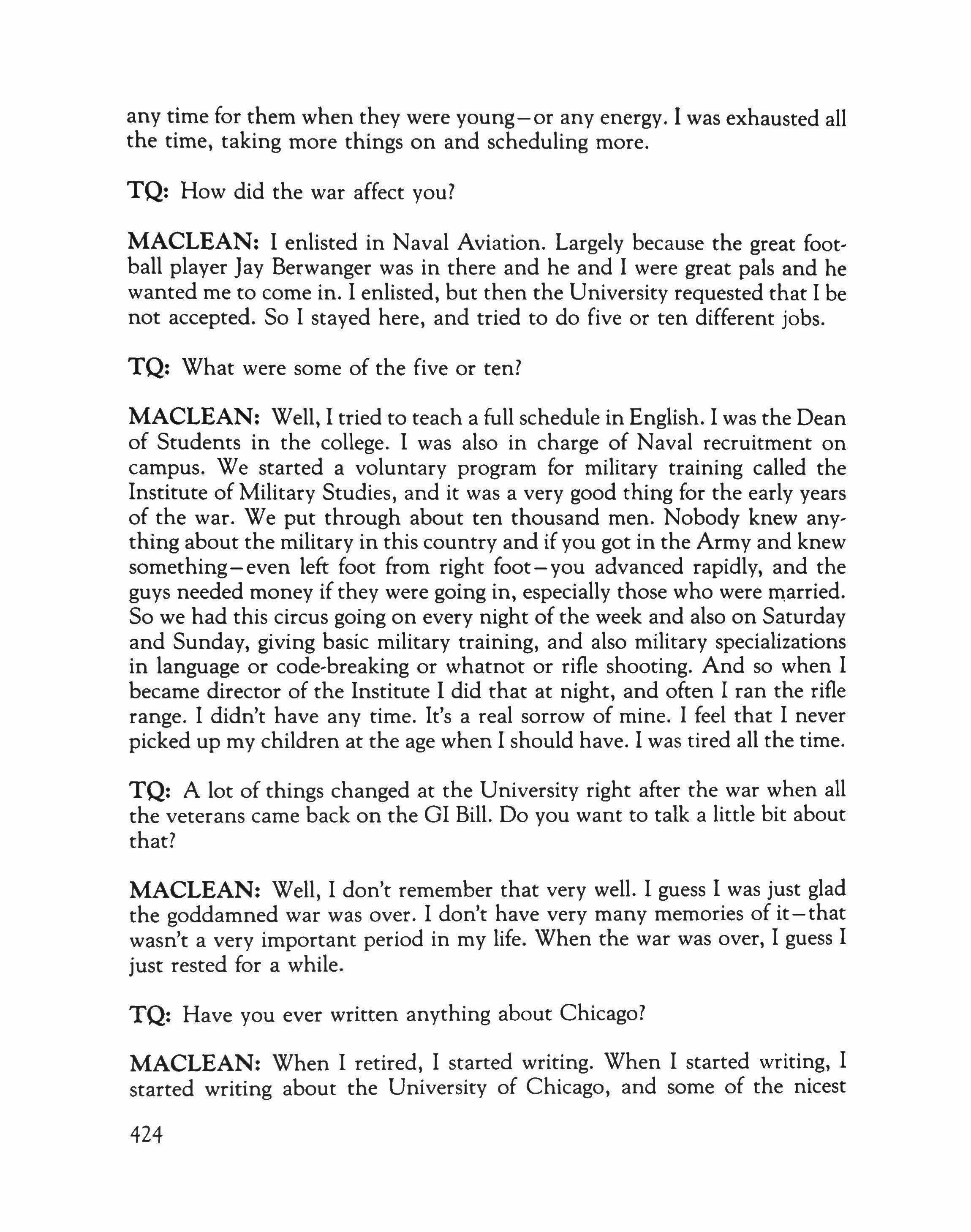
any time for them when they were young-or any energy. I was exhausted all the time, taking more things on and scheduling more.
TQ: How did the war affect you?
MACLEAN: I enlisted in Naval Aviation. Largely because the great foot, ball player Jay Berwanger was in there and he and I were great pals and he wanted me to come in. I enlisted, but then the University requested that I be not accepted. So I stayed here, and tried to do five or ten different jobs.
TQ: What were some of the five or ten?
MACLEAN: Well, I tried to teach a full schedule in English. I was the Dean of Students in the college. I was also in charge of Naval recruitment on campus. We started a voluntary program for military training called the Institute of Military Studies, and it was a very good thing for the early years of the war. We put through about ten thousand men. Nobody knew any, thing about the military in this country and if you got in the Army and knew something-even left foot from right foot-you advanced rapidly, and the guys needed money if they were going in, especially those who were married. So we had this circus going on every night of the week and also on Saturday and Sunday, giving basic military training, and also military specializations in language or code-breaking or whatnot or rifle shooting. And so when I became director of the Institute I did that at night, and often I ran the rifle range. I didn't have any time. It's a real sorrow of mine. I feel that I never picked up my children at the age when I should have. I was tired all the time.
TQ: A lot of things changed at the University right after the war when all the veterans came back on the 01 Bill. Do you want to talk a little bit about that?
MACLEAN: Well, I don't remember that very well. I guess I was just glad the goddamned war was over. I don't have very many memories of it-that wasn't a very important period in my life. When the war was over, I guess I just rested for a while.
TQ: Have you ever written anything about Chicago?
MACLEAN: When I retired, I started writing. When I started writing, I started writing about the University of Chicago, and some of the nicest
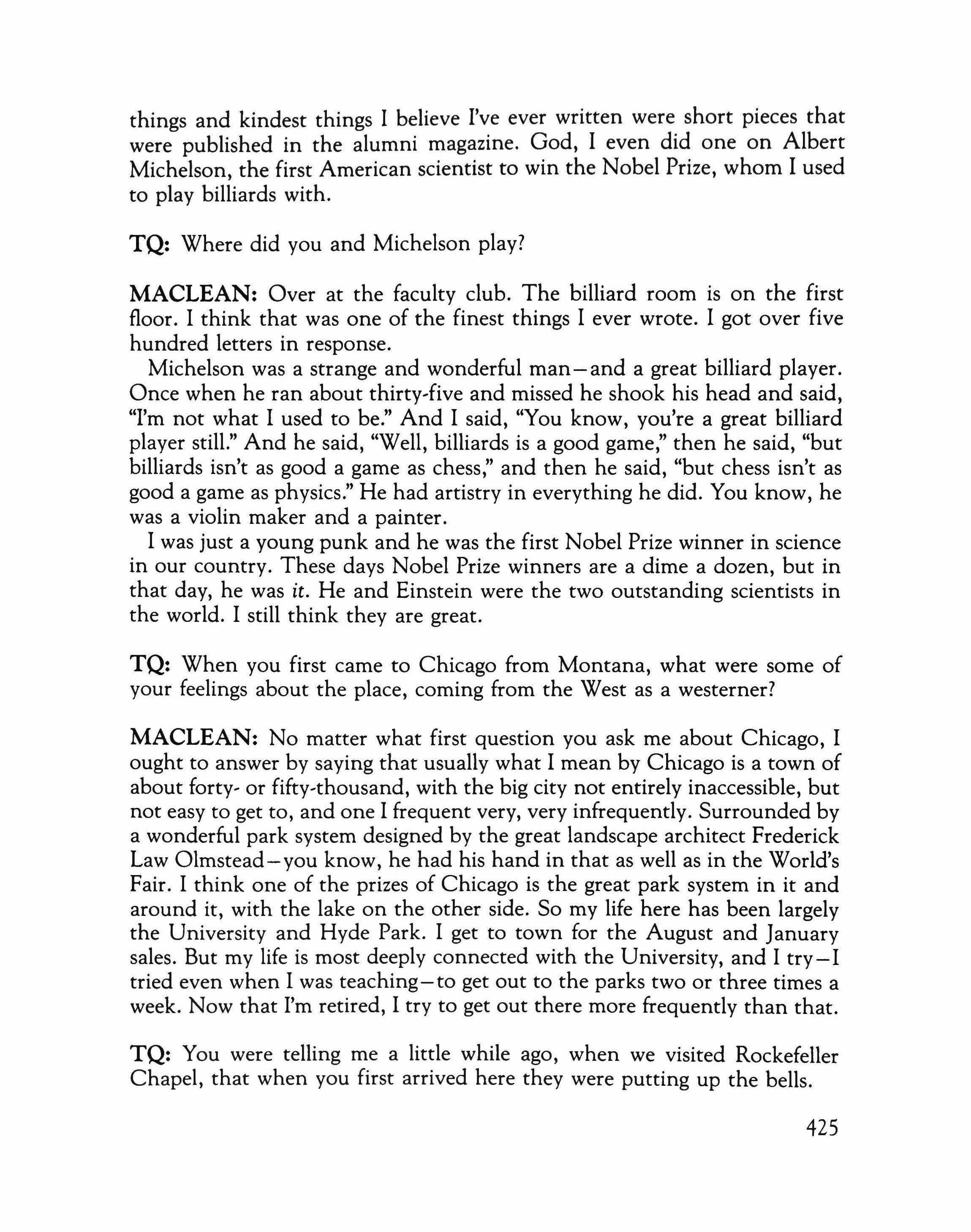
things and kindest things I believe I've ever written were short pieces that were published in the alumni magazine. God, I even did one on Albert Michelson, the first American scientist to win the Nobel Prize, whom I used to play billiards with.
TQ: Where did you and Michelson play?
MACLEAN: Over at the faculty club. The billiard room is on the first floor. I think that was one of the finest things I ever wrote. I got over five hundred letters in response.
Michelson was a strange and wonderful man - and a great billiard player. Once when he ran about thirty-five and missed he shook his head and said, "I'm not what I used to be." And I said, "You know, you're a great billiard player still." And he said, "Well, billiards is a good game," then he said, "but billiards isn't as good a game as chess," and then he said, "but chess isn't as good a game as physics." He had artistry in everything he did. You know, he was a violin maker and a painter.
I was just a young punk and he was the first Nobel Prize winner in science in our country. These days Nobel Prize winners are a dime a dozen, but in that day, he was it. He and Einstein were the two outstanding scientists in the world. I still think they are great.
TQ: When you first came to Chicago from Montana, what were some of your feelings about the place, coming from the West as a westerner?
MACLEAN: No matter what first question you ask me about Chicago, I ought to answer by saying that usually what I mean by Chicago is a town of about forty, or fifrv-thousand, with the big city not entirely inaccessible, but not easy to get to, and one I frequent very, very infrequently. Surrounded by a wonderful park system designed by the great landscape architect Frederick Law Olmstead-you know, he had his hand in that as well as in the World's Fair. I think one of the prizes of Chicago is the great park system in it and around it, with the lake on the other side. So my life here has been largely the University and Hyde Park. I get to town for the August and January sales. But my life is most deeply connected with the University, and I try-I tried even when I was teaching-to get out to the parks two or three times a week. Now that I'm retired, I try to get out there more frequently than that.
TQ: You were telling me a little while ago, when we visited Rockefeller Chapel, that when you first arrived here they were putting up the bells.
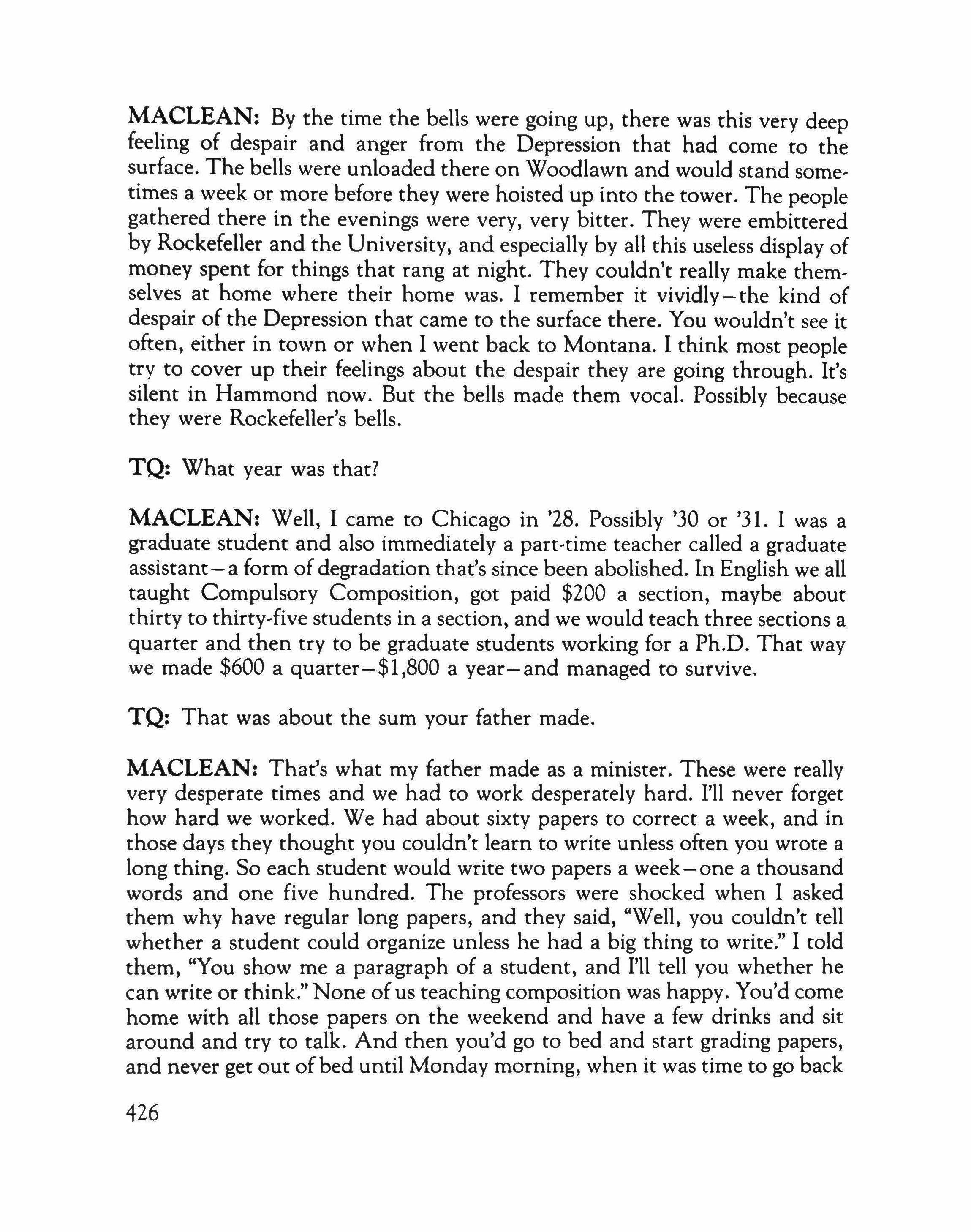
MACLEAN: By the time the bells were going up, there was this very deep feeling of despair and anger from the Depression that had come to the surface. The bells were unloaded there on Woodlawn and would stand sometimes a week or more before they were hoisted up into the tower. The people gathered there in the evenings were very, very bitter. They were embittered by Rockefeller and the University, and especially by all this useless display of money spent for things that rang at night. They couldn't really make themselves at home where their home was. I remember it vividly-the kind of despair of the Depression that came to the surface there. You wouldn't see it often, either in town or when I went back to Montana. I think most people try to cover up their feelings about the despair they are going through. It's silent in Hammond now. But the bells made them vocal. Possibly because they were Rockefeller's bells.
TQ: What year was that?
MACLEAN: Well, I came to Chicago in '2B. Possibly '30 or '31. I was a graduate student and also immediately a part-time teacher called a graduate assistant-a form ofdegradation that's since been abolished. In English we all taught Compulsory Composition, got paid $200 a section, maybe about thirty to thirty-five students in a section, and we would teach three sections a quarter and then try to be graduate students working for a Ph.D. That way we made $600 a quarter-$l,BOO a year-and managed to survive.
TQ: That was about the sum your father made.
MACLEAN: That's what my father made as a minister. These were really very desperate times and we had to work desperately hard. I'll never forget how hard we worked. We had about sixty papers to correct a week, and in those days they thought you couldn't learn to write unless often you wrote a long thing. So each student would write two papers a week - one a thousand words and one five hundred. The professors were shocked when I asked them why have regular long papers, and they said, "Well, you couldn't tell whether a student could organize unless he had a big thing to write." I told them, "You show me a paragraph of a student, and I'll tell you whether he can write or think." None of us teaching composition was happy. You'd come home with all those papers on the weekend and have a few drinks and sit around and try to talk. And then you'd go to bed and start grading papers, and never get out of bed until Monday morning, when it was time to go back
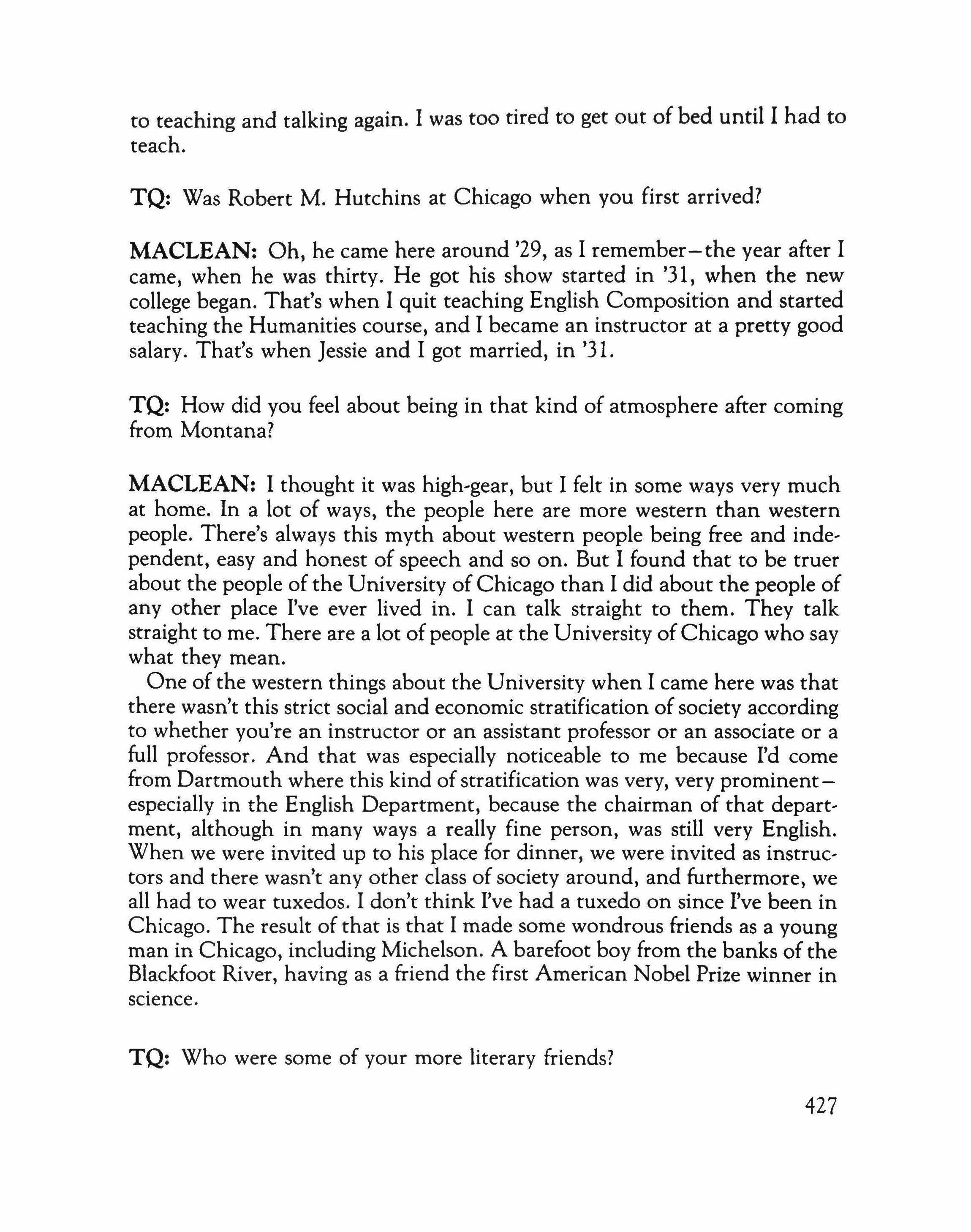
to teaching and talking again. I was too tired to get out of bed until I had to teach.
TQ: Was Robert M. Hutchins at Chicago when you first arrived?
MACLEAN: Oh, he came here around '29, as I remember-the year after I came, when he was thirty. He got his show started in '31, when the new college began. That's when I quit teaching English Composition and started teaching the Humanities course, and I became an instructor at a pretty good salary. That's when Jessie and I got married, in '31.
TQ: How did you feel about being in that kind of atmosphere after coming from Montana?
MACLEAN: I thought it was high-gear, but I felt in some ways very much at home. In a lot of ways, the people here are more western than western people. There's always this myth about western people being free and independent, easy and honest of speech and so on. But I found that to be truer about the people of the University of Chicago than I did about the people of any other place I've ever lived in. I can talk straight to them. They talk straight to me. There are a lot ofpeople at the University ofChicago who say what they mean.
One of the western things about the University when I came here was that there wasn't this strict social and economic stratification of society according to whether you're an instructor or an assistant professor or an associate or a full professor. And that was especially noticeable to me because I'd come from Dartmouth where this kind of stratification was very, very prominentespecially in the English Department, because the chairman of that depart, ment, although in many ways a really fine person, was still very English. When we were invited up to his place for dinner, we were invited as instructors and there wasn't any other class of society around, and furthermore, we all had to wear tuxedos. I don't think I've had a tuxedo on since I've been in Chicago. The result of that is that I made some wondrous friends as a young man in Chicago, including Michelson. A barefoot boy from the banks of the Blackfoot River, having as a friend the first American Nobel Prize winner in science.
TQ: Who were some of your more literary friends?

MACLEAN: Another of my dear friends was Ferdinand Schevill, who had been an early member of the faculty and a great historian and a vivid and wonderful character-a great storyteller, and very learned, his specialty being Florence, Italy. He had such a vivid personality that he had a universal circle of friends of a literary nature. He himself had a summer home in the dunes just north of Michigan City, where many university faculty had homes or spent the weekend. They'd take the Yellow Peril out there to Michigan City and then walk or have a bicycle and ride twenty-five or thirty miles.
He had formed a great friendship with Carl Sandburg and Sherwood Anderson. Of course, it was still the time when Chicago was one of the great literary centers in the world. The real guys were here in those days and not in New York or some other place. So two of his great friends were Sandburg and Sherwood Anderson, and he was closely associated with Sandburg from his University of Chicago days. In those days there was a great interlacing between faculty and literary and artistic guys in Chicago that there isn't now. It was really a more solid community. So he knew Sandburg well and Sandburg had this place out in the dunes area, built right into the sand dunes with these goats, you know, on the roof of his place and the sand coming down, and the goats would go up there and graze-a kind of strange and wonderful place. And Ferdinand would take me along with him.
Now Schevill and Sherwood Anderson were great friends also, but Sherwood had great contempt for Sandburg. He thought he was a kind of moaner, and not a writer, getting by saying rn-rn-m-m-m, the way he read his poetry - kind of in a singsong way. He just didn't rate Sandburg as a writer at all, and thought he was full of crap. On the other hand, Ferdinand and Sherwood had this fixed friendship-partly based on both of them thinking they were great croquet players. Sherwood was running that newspaper in West Virginia and Ferdinand would go to West Virginia and they'd have these croquet tournaments, and they kept a regular inventory of their games year after year. They would change places and Sherwood would come to see Ferdinand in Chicago. They were very careful to take turns.
So it was Sherwood's turn and he was going to come up here and have his round of croquet games. I was invited out to Ferdinand's and Sherwood was there, and Sherwood would say, "Well, I suppose we'll have to go up and listen to that old bullshitter tonight." That meant Sandburg. And Ferdinand said, "You know, you shouldn't feel he doesn't feel that way about you he'd be horrified." And Sherwood said, "I'll go up there." But he wasn't very happy about it.
So up we go, after the day was over, to Sandburg's home, and we come in the door on a little platform that was higher than the floor of the main room.
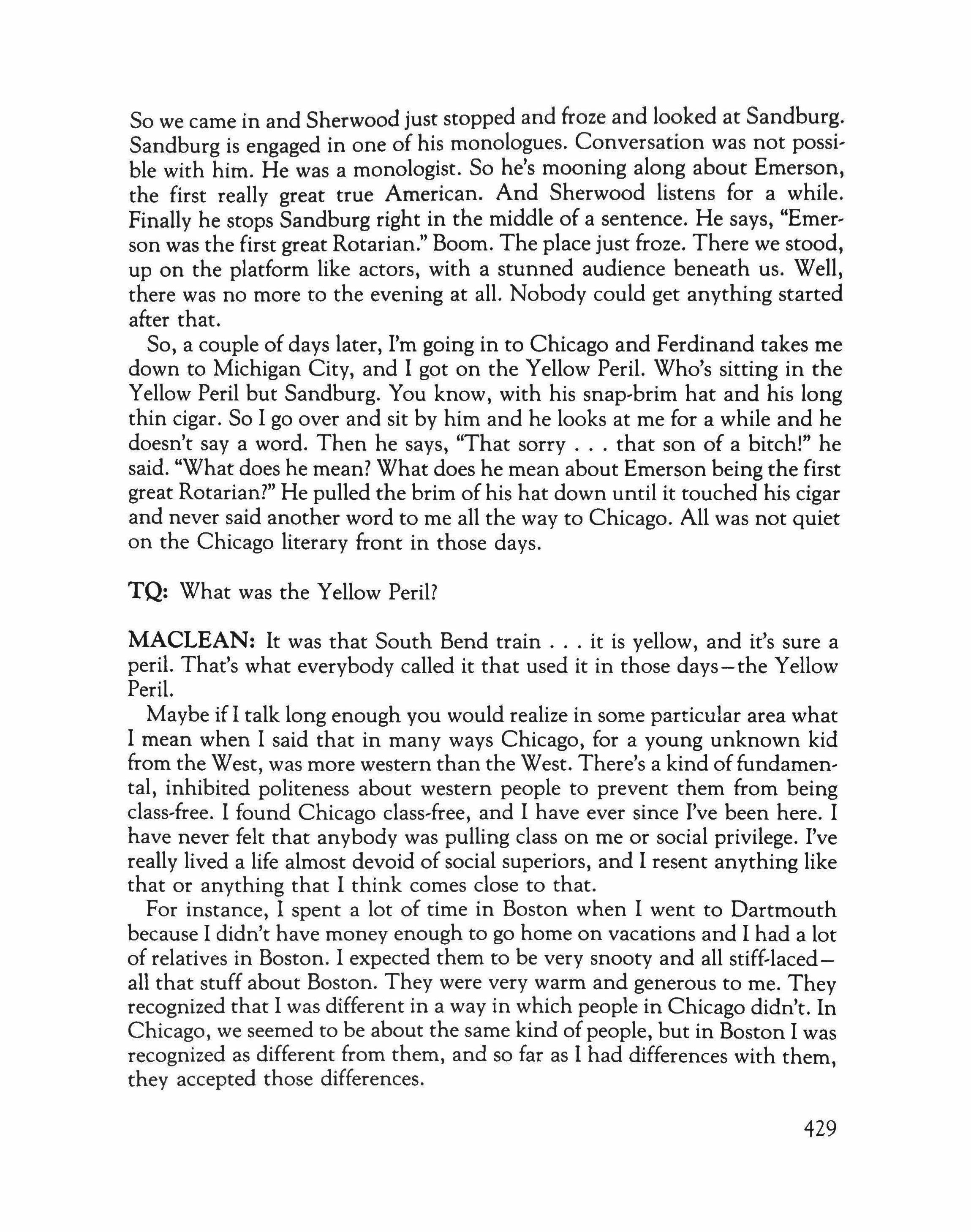
So we came in and Sherwood just stopped and froze and looked at Sandburg. Sandburg is engaged in one of his monologues. Conversation was not possible with him. He was a monologist. So he's mooning along about Emerson, the first really great true American. And Sherwood listens for a while. Finally he stops Sandburg right in the middle of a sentence. He says, "Emerson was the first great Rotarian." Boom. The place just froze. There we stood, up on the platform like actors, with a stunned audience beneath us. Well, there was no more to the evening at all. Nobody could get anything started after that.
So, a couple of days later, I'm going in to Chicago and Ferdinand takes me down to Michigan City, and I got on the Yellow Peril. Who's sitting in the Yellow Peril but Sandburg. You know, with his snap-brim hat and his long thin cigar. So I go over and sit by him and he looks at me for a while and he doesn't say a word. Then he says, "That sorry that son of a bitch!" he said. "What does he mean? What does he mean about Emerson being the first great Rotarian?" He pulled the brim of his hat down until it touched his cigar and never said another word to me all the way to Chicago. All was not quiet on the Chicago literary front in those days.
TQ: What was the Yellow Peril?
MACLEAN: It was that South Bend train it is yellow, and it's sure a peril. That's what everybody called it that used it in those days-the Yellow Peril.
Maybe if I talk long enough you would realize in some particular area what I mean when I said that in many ways Chicago, for a young unknown kid from the West, was more western than the West. There's a kind offundamental, inhibited politeness about western people to prevent them from being class-free. I found Chicago class-free, and I have ever since I've been here. I have never felt that anybody was pulling class on me or social privilege. I've really lived a life almost devoid of social superiors, and I resent anything like that or anything that I think comes close to that.
For instance, I spent a lot of time in Boston when I went to Dartmouth because I didn't have money enough to go home on vacations and I had a lot of relatives in Boston. I expected them to be very snooty and all stiff,lacedall that stuff about Boston. They were very warm and generous to me. They recognized that I was different in a way in which people in Chicago didn't. In Chicago, we seemed to be about the same kind of people, but in Boston I was recognized as different from them, and so far as I had differences with them, they accepted those differences.

TQ: Do you think Chicago is still class-free?
MACLEAN: Well, it's hard for me to tell. In the years since I retired I wanted to write a few things before I died. I've had to give up many things. I've had to give up friends and society and a lot of the time that I normally would have spent with people, so I don't know. My guess is, no, it hasn't changed much. A Scotch poet would say, "A man's a man for a' that and a' that and a' that."
TQ: Do you think that cuts across racial lines as well?
MACLEAN: Yes, I'm almost devoid of racial feeling, and I feel fortunate.
TQ: I didn't mean you, personally, I meant the openness of the city.
MACLEAN: No, the city in some ways has aspects of ethnic growth much like Canada's, for instance, where each ethnic group has really been encouraged-not merely permitted but encouraged-to retain its Russian or Yugoslavian nature. There's some of that here. I found it very warm-hearted as a city. The Italians are warm-hearted, the Jews are warm-hearted. The Irish are in some ways the snootiest of all, the most inbred. They really can do without you, except your vote. But I'm very happy about the relations I've had with the different ethnic groups. I'm happy, too, that they cook so well.
TQ: Did you ever go to some of the jazz places on the South Side?
MACLEAN: When I first came here, you know, it was the center of black migration from the South-right across the park. Some of the greatest jazz outfits ever put together played there. They didn't go all the way into the Loop station. They were riding the rods and they'd get arrested if they rode all the way into the Loop. So there was a station here at Sixty-third. They'd roll off at Sixty-third Street. You can't believe the great jazz musicians we had. Saturday nights we'd all go walking across the park. We had a gang. Even then, people never walked across the parks alone. We'd get a gang and go over there. And they tell me it's good again, some really good outfits over there, but I'm too old to care.
TQ: What are some of your favorite city pastimes?
MACLEAN: I just told you.
430
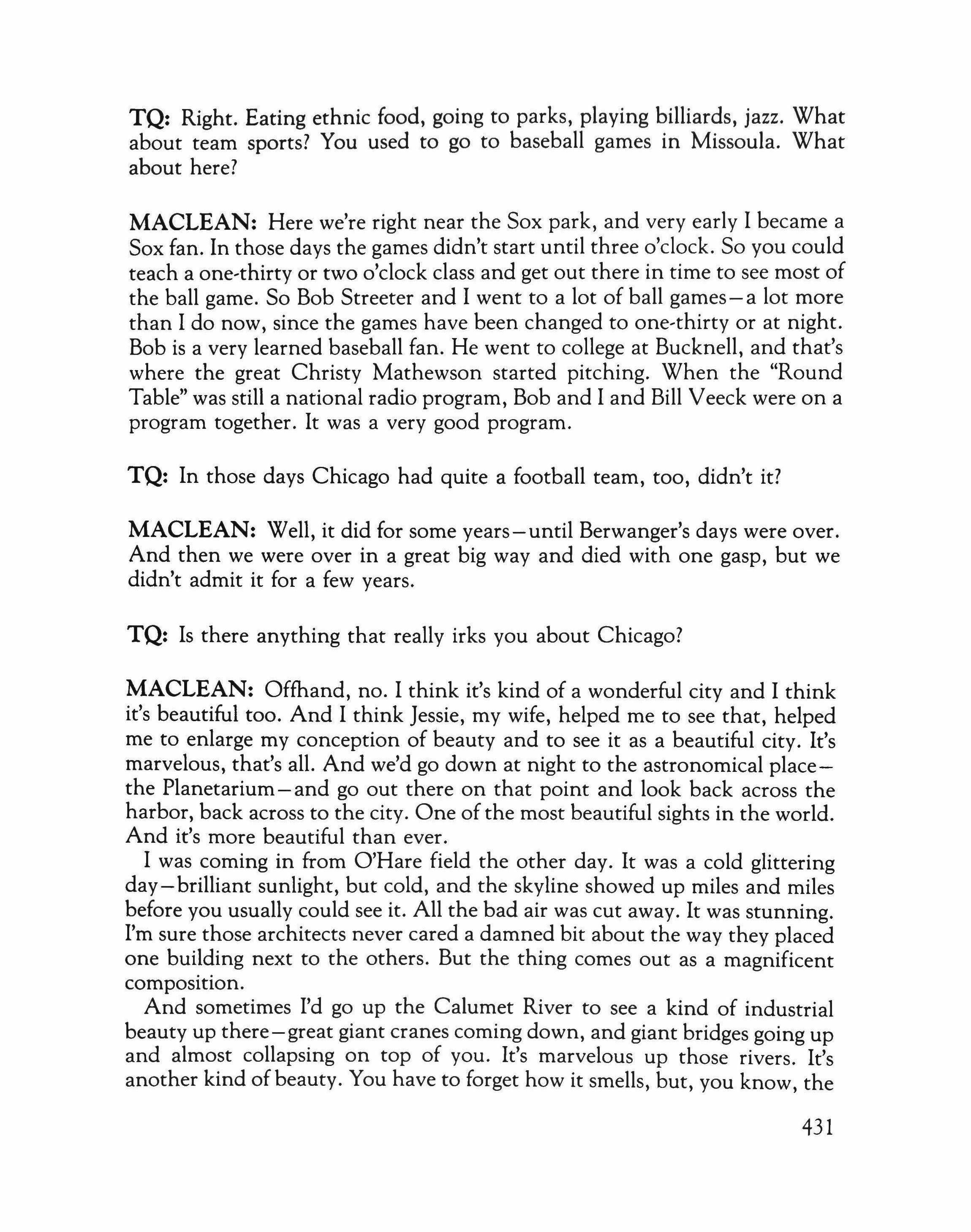
TQ: Right. Eating ethnic food, going to parks, playing billiards, jazz. What about team sports? You used to go to baseball games in Missoula. What about here?
MACLEAN: Here we're right near the Sox park, and very early I became a Sox fan. In those days the games didn't start until three o'clock. So you could teach a one-thirty or two o'clock class and get out there in time to see most of the ball game. So Bob Streeter and I went to a lot of ball games-a lot more than I do now, since the games have been changed to one-thirty or at night. Bob is a very learned baseball fan. He went to college at Bucknell, and that's where the great Christy Mathewson started pitching. When the "Round Table" was still a national radio program, Bob and I and Bill Veeck were on a program together. It was a very good program.
TQ: In those days Chicago had quite a football team, too, didn't it?
MACLEAN: Well, it did for some years-until Berwanger's days were over. And then we were over in a great big way and died with one gasp, but we didn't admit it for a few years.
TQ: Is there anything that really irks you about Chicago?
MACLEAN: Offhand, no. I think it's kind of a wonderful city and I think it's beautiful too. And I think Jessie, my wife, helped me to see that, helped me to enlarge my conception of beauty and to see it as a beautiful city. It's marvelous, that's all. And we'd go down at night to the astronomical placethe Planetarium - and go out there on that point and look back across the harbor, back across to the city. One of the most beautiful sights in the world. And it's more beautiful than ever.
I was coming in from O'Hare field the other day. It was a cold glittering day-brilliant sunlight, but cold, and the skyline showed up miles and miles before you usually could see it. All the bad air was cut away. It was stunning. I'm sure those architects never cared a damned bit about the way they placed one building next to the others. But the thing comes out as a magnificent composition.
And sometimes I'd go up the Calumet River to see a kind of industrial beauty up there - great giant cranes coming down, and giant bridges going up and almost collapsing on top of you. It's marvelous up those rivers. It's another kind ofbeauty. You have to forget how it smells, but, you know, the

Post�lmpressionists would have loved it. There's picture after picture of this kind of structural beauty. It's not the Blackfoot River, but it's very beautiful.
TQ: There's a kind of beauty about the work-the human work that's involved in there, too.
MACLEAN: Oh, isn't it? Of course I'm attracted to that. That's one reason why I like logging so much. It's a gigantic thing. But a lot of this big urban work and industry is just as gigantic and fabulous. Fabulous what men can move and do. Every time they dig a goddamned basement over at the University for a new building, I can't keep my eyes off that son of a bitch running the crane. He does things with that crane a woman can't do with a sewing machine, they're so delicate. Great blocks. And this crane comes down and picks up the whole thing, takes it way the hell up in the air, hands it over to some guy up there who does marvelous things with it. All as if it were weightless. Incredible! Workmen in the big city.
TQ: Now you seem to feel very much the city is your home.
MACLEAN: If you are going to make another place a second home you have to work both sides of the street. You have to pick spots that are like your first home to keep you from feeling lonely and not in one piece. That's why I like the Morton Arboretum and Palos Park. I can get in my car at the University and in twenty-five minutes I can be where there are wild deer and beaver. The other side of the street is the Calumet River and the giant cranes and gigantic structural beauty. And the skyline as you look across the harbor at night from the Planetarium - it may be the most beautiful city sight in the world.
Yes, I like this place. I feel-I truly feel, without any schizophrenia any more-I really feel that I am someone with two homes, and they're not very different really. I've been careful to see they didn't get too different.
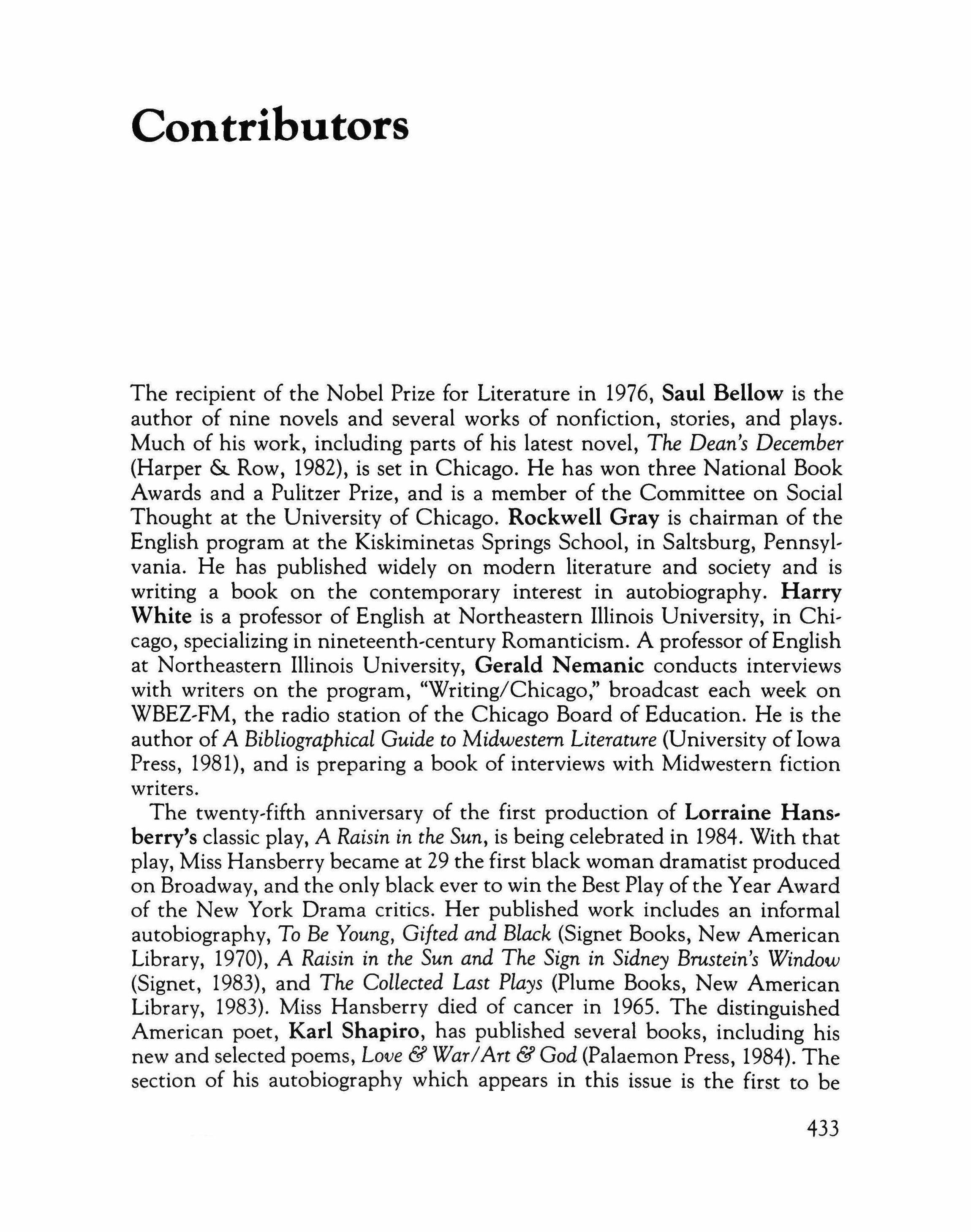
The recipient of the Nobel Prize for Literature in 1976, Saul Bellow is the author of nine novels and several works of nonfiction, stories, and plays. Much of his work, including parts of his latest novel, The Dean's December (Harper & Row, 1982), is set in Chicago. He has won three National Book Awards and a Pulitzer Prize, and is a member of the Committee on Social Thought at the University of Chicago. Rockwell Gray is chairman of the English program at the Kiskiminetas Springs School, in Saltsburg, Pennsvlvania. He has published widely on modern literature and society and is writing a book on the contemporary interest in autobiography. Harry White is a professor of English at Northeastern Illinois University, in Chi, cago, specializing in nineteenth-century Romanticism. A professor ofEnglish at Northeastern Illinois University, Gerald Nemanic conducts interviews with writers on the program, "Writing/Chicago," broadcast each week on WBEZ,FM, the radio station of the Chicago Board of Education. He is the author of A Bibliographical Guide to Midwestern Literature (University of Iowa Press, 1981), and is preparing a book of interviews with Midwestern fiction writers.
The twenty-fifth anniversary of the first production of Lorraine Hans berry's classic play, A Raisin in the Sun, is being celebrated in 1984. With that play, Miss Hansberry became at 29 the first black woman dramatist produced on Broadway, and the only black ever to win the Best Play of the Year Award of the New York Drama critics. Her published work includes an informal autobiography, To Be Young, Gifted and Black (Signet Books, New American Library, 1970), A Raisin in the Sun and The Sign in Sidney Brustein's Window (Signet, 1983), and The Collected Last Plays (Plume Books, New American Library, 1983). Miss Hansberry died of cancer in 1965. The distinguished American poet, Karl Shapiro, has published several books, including his new and selected poems, Love & War/Art & God (Palaemon Press, 1984). The section of his autobiography which appears in this issue is the first to be
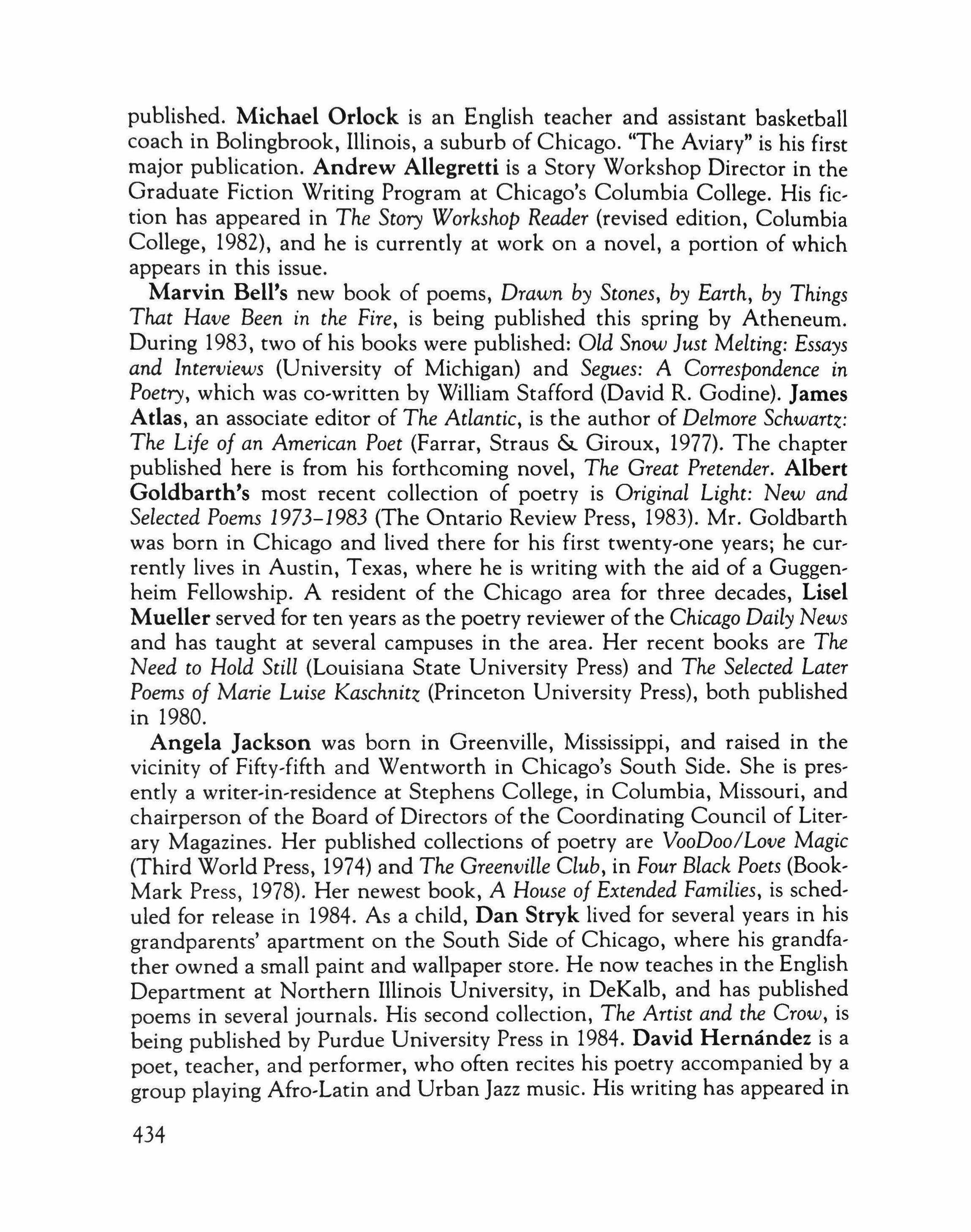
published. Michael Orlock is an English teacher and assistant basketball coach in Bolingbrook, Illinois, a suburb of Chicago. "The Aviary" is his first major publication. Andrew Allegretti is a Story Workshop Director in the Graduate Fiction Writing Program at Chicago's Columbia College. His fietion has appeared in The Story Workshop Reader (revised edition, Columbia College, 1982), and he is currently at work on a novel, a portion of which appears in this issue.
Marvin Bell's new book of poems, Drawn by Stones, by Earth, by Things That Have Been in the Fire, is being published this spring by Atheneum. During 1983, two of his books were published: Old Snow Just Melting: Essays and Interviews (University of Michigan) and Segues: A Correspondence in Poetry, which was co-written by William Stafford (David R. Godine). James Atlas, an associate editor of The Atlantic, is the author of Delmore Schwartz: The Life of an American Poet (Farrar, Straus & Giroux, 1977). The chapter published here is from his forthcoming novel, The Great Pretender. Albert Goldbarth's most recent collection of poetry is Original Light: New and Selected Poems 1973-1983 (The Ontario Review Press, 1983). Mr. Goldbarth was born in Chicago and lived there for his first twenty-one years; he currently lives in Austin, Texas, where he is writing with the aid of a Guggenheim Fellowship. A resident of the Chicago area for three decades, Lisel Mueller served for ten years as the poetry reviewer ofthe Chicago Daily News and has taught at several campuses in the area. Her recent books are The Need to Hold Still (Louisiana State University Press) and The Selected Later Poems of Marie Luise Kaschnitz (Princeton University Press), both published in 1980.
Angela Jackson was born in Greenville, Mississippi, and raised in the vicinity of Fifty-fifth and Wentworth in Chicago's South Side. She is presently a writer-in-residence at Stephens College, in Columbia, Missouri, and chairperson of the Board of Directors of the Coordinating Council of Literary Magazines. Her published collections of poetry are VooDoo/Love Magic (Third World Press, 1974) and The Greenville Club, in Four Black Poets (BookMark Press, 1978). Her newest book, A House of Extended Families, is scheduled for release in 1984. As a child, Dan Strvk lived for several years in his grandparents' apartment on the South Side of Chicago, where his grandfather owned a small paint and wallpaper store. He now teaches in the English Department at Northern Illinois University, in DeKalb, and has published poems in several journals. His second collection, The Artist and the Crow, is being published by Purdue University Press in 1984. David Hernandez is a poet, teacher, and performer, who often recites his poetry accompanied by a group playing Afro-Latin and Urban Jazz music. His writing has appeared in 434
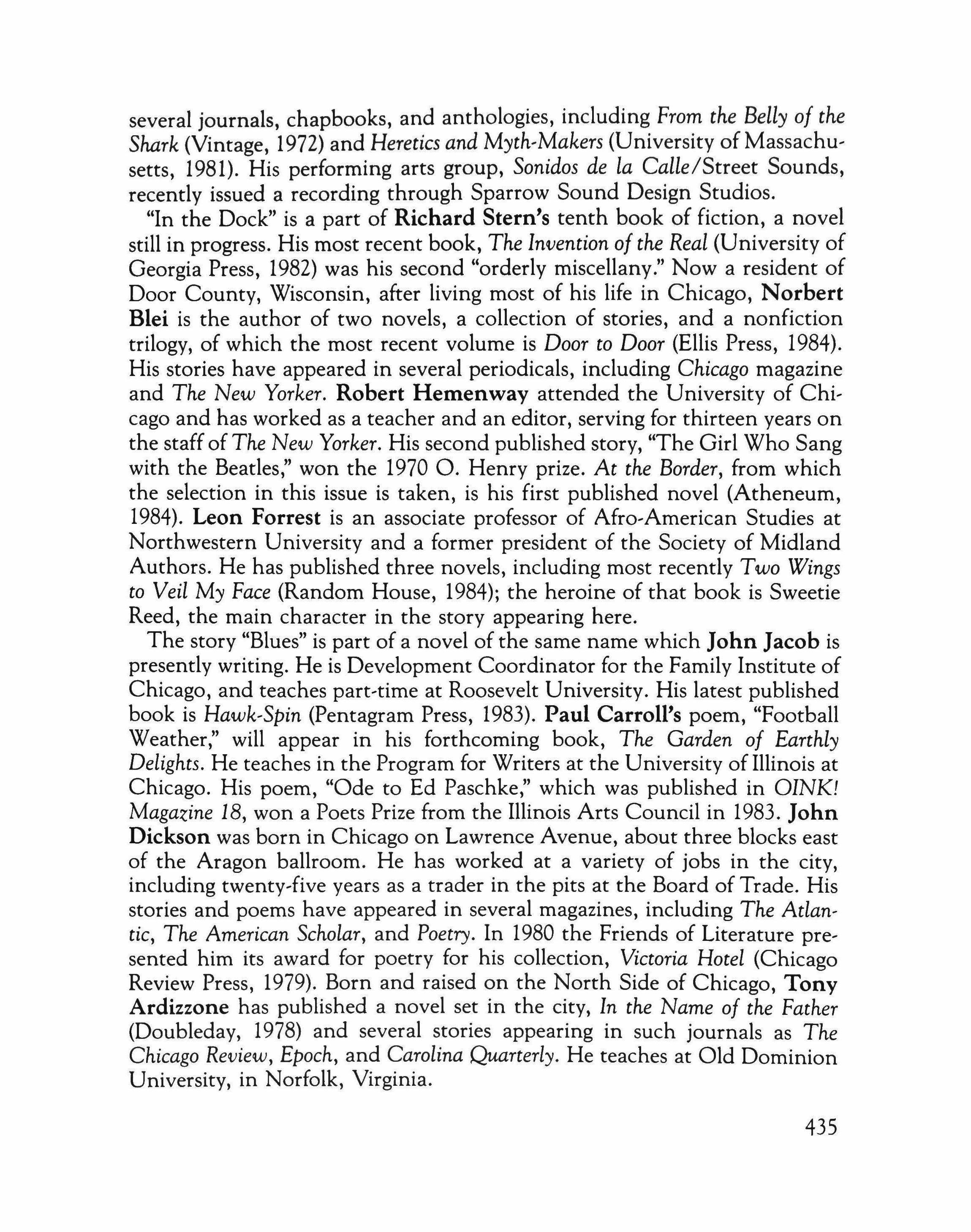
several journals, chapbooks, and anthologies, including From the Belly of the Shark (Vintage, 1972) and Heretics and Myth,Makers (University of Massachusetts, 1981). His performing arts group, Sonidos de la Calle/Street Sounds, recently issued a recording through Sparrow Sound Design Studios.
"In the Dock" is a part of Richard Stern's tenth book of fiction, a novel still in progress. His most recent book, The Invention of the Real (University of Georgia Press, 1982) was his second "orderly miscellany." Now a resident of Door County, Wisconsin, after living most of his life in Chicago, Norbert Blei is the author of two novels, a collection of stories, and a nonfiction trilogy, of which the most recent volume is Door to Door (Ellis Press, 1984). His stories have appeared in several periodicals, including Chicago magazine and The New Yorker. Robert Hemenway attended the University of Chi, cago and has worked as a teacher and an editor, serving for thirteen years on the staff of The New Yorker. His second published story, "The Girl Who Sang with the Beatles," won the 1970 O. Henry prize. At the Border, from which the selection in this issue is taken, is his first published novel (Atheneum, 1984). Leon Forrest is an associate professor of Afro-American Studies at Northwestern University and a former president of the Society of Midland Authors. He has published three novels, including most recently Two Wings to Veil My Face (Random House, 1984); the heroine of that book is Sweetie Reed, the main character in the story appearing here.
The story "Blues" is part of a novel of the same name which John Jacob is presently writing. He is Development Coordinator for the Family Institute of Chicago, and teaches part-time at Roosevelt University. His latest published book is Hawk,Spin (Pentagram Press, 1983). Paul Carroll's poem, "Football Weather," will appear in his forthcoming book, The Garden of Earthly Delights. He teaches in the Program for Writers at the University of Illinois at Chicago. His poem, "Ode to Ed Paschke," which was published in OINK! Magazine 18, won a Poets Prize from the Illinois Arts Council in 1983. John Dickson was born in Chicago on Lawrence Avenue, about three blocks east of the Aragon ballroom. He has worked at a variety of jobs in the city, including twenty-five years as a trader in the pits at the Board of Trade. His stories and poems have appeared in several magazines, including The Atlan, tic, The American Scholar, and Poetry. In 1980 the Friends of Literature pre' sented him its award for poetry for his collection, Victoria Hotel (Chicago Review Press, 1979). Born and raised on the North Side of Chicago, Tony Ardizzone has published a novel set in the city, In the Name of the Father (Doubleday, 1978) and several stories appearing in such journals as The Chicago Review, Epoch, and Carolina Quarterly. He teaches at Old Dominion University, in Norfolk, Virginia. 435
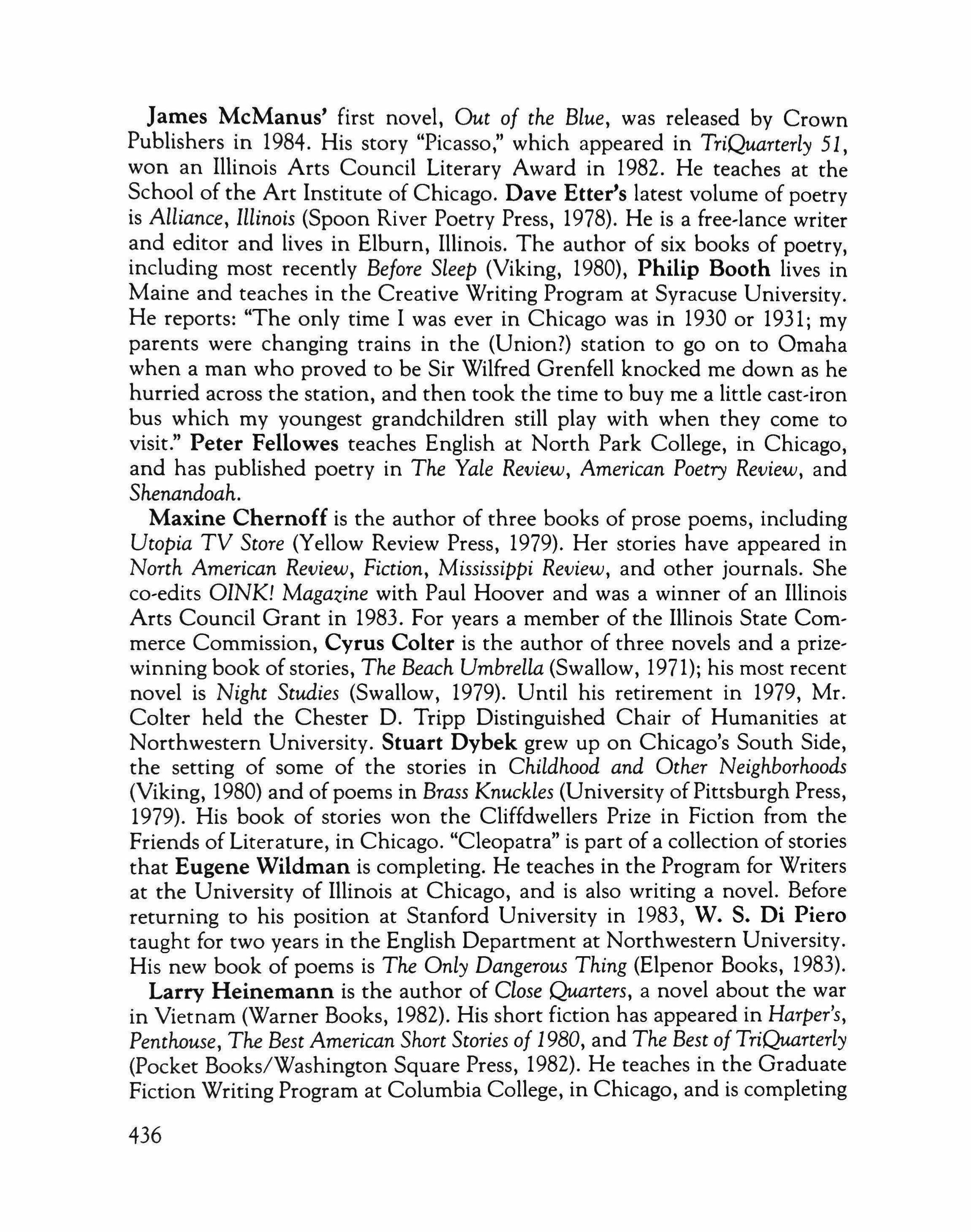
James McManus' first novel, Out of the Blue, was released by Crown Publishers in 1984. His story "Picasso," which appeared in TriQuarterly 51, won an Illinois Arts Council Literary Award in 1982. He teaches at the School of the Art Institute of Chicago. Dave Etter's latest volume of poetry is Alliance, Illinois (Spoon River Poetry Press, 1978). He is a free-lance writer and editor and lives in Elburn, Illinois. The author of six books of poetry, including most recently Before Sleep (Viking, 1980), Philip Booth lives in Maine and teaches in the Creative Writing Program at Syracuse University. He reports: "The only time I was ever in Chicago was in 1930 or 1931; my parents were changing trains in the (Union?) station to go on to Omaha when a man who proved to be Sir Wilfred Grenfell knocked me down as he hurried across the station, and then took the time to buy me a little cast,iron bus which my youngest grandchildren still play with when they come to visit." Peter Fellowes teaches English at North Park College, in Chicago, and has published poetry in The Yale Review, American Poetry Review, and Shenandoah.
Maxine Chernoff is the author of three books of prose poems, including Utopia TV Store (Yellow Review Press, 1979). Her stories have appeared in North American Review, Fiction, MississiPPi Review, and other journals. She co-edits OINK! Magazine with Paul Hoover and was a winner of an Illinois Arts Council Grant in 1983. For years a member of the Illinois State Com, merce Commission, Cyrus Colter is the author of three novels and a prize' winning book of stories, The Beach Umbrella (Swallow, 1971); his most recent novel is Night Studies (Swallow, 1979). Until his retirement in 1979, Mr. Colter held the Chester D. Tripp Distinguished Chair of Humanities at Northwestern University. Stuart Dvbek grew up on Chicago's South Side, the setting of some of the stories in Childhood and Other Neighborhoods (Viking, 1980) and of poems in Brass Knuckles (University of Pittsburgh Press, 1979). His book of stories won the Cliffdwellers Prize in Fiction from the Friends of Literature, in Chicago. "Cleopatra" is part of a collection of stories that Eugene Wildman is completing. He teaches in the Program for Writers at the University of Illinois at Chicago, and is also writing a novel. Before returning to his position at Stanford University in 1983, W. S. Di Piero taught for two years in the English Department at Northwestern University. His new book of poems is The Only Dangerous Thing (Elpenor Books, 1983).
Larry Heinemann is the author of Close Quarters, a novel about the war in Vietnam (Warner Books, 1982). His short fiction has appeared in Harper's, Penthouse, The Best American Short Stories of 1980, and The Best ofTriQuarterly (Pocket Books/Washington Square Press, 1982). He teaches in the Graduate Fiction Writing Program at Columbia College, in Chicago, and is completing

a new novel. The author of several novels and volumes of stories, Harry Mark Petrakis published two books in 1983, the novel Days of Vengeance (Doubleday) and a work of autobiography, Reflections; A Writer's Life, A Writer's Work (Lake View Press). Dennis Schmitz' latest book is String (Ecco Press, 1980); a new volume of his poetry will be published by Ecco in spring 1985. He lies in Sacramento. Mary Trimble is a free-lance writer and screen' writer living in Chicago. Her work appears in various literary magazines, and her first book of poems, The Woman at the Foot of the Mountain, was pub, lished in 1980 by Black Cat Bone Press. David Wagoner grew up in Whiting, Indiana, southeast of Chicago. He has published thirteen books of poetry and ten novels, some of which are set in Chicago. His latest works are a novel, The Hanging Garden (1980) and a book of poetry, First Light (1983), both published by Atlantic-Little, Brown. He is the editor of Poetry North, west.
With her book of poetry, Annie Allen (Harper & Row, 1949), Gwendolyn Brooks became, in 1950, the first black woman to win the Pulitzer Prize. She has published a number of books of poetry and fiction, including The World of Gwendolyn Brooks (Harper & Row, 1970), Report from Part One: An Autobi, ography (Broadside, 1972), and Beckonings (Broadside, 1975). Norman Maclean is the author of A River Runs Through It, recently republished with photographs by Joel Snyder (University of Chicago Press), and is at work on a novel about a forest fire that killed thirteen "smoke jumpers" in Montana in 1949, called The Sky, Young Men, and Fire. William Kittredge teaches creative writing at the University of Montana. His next book of stories, We Are Not in This Together, is being published by Graywolf Press in 1984. Annick Smith is a filmmaker and writer who lives in Montana's Blackfoot Valley. She was executive producer of the film, "Heartland," a story of pioneer life on the Great Plains.
Photographer Nathaniel C. Burkins has worked in the Chicago area for the past decade. He is represented by the Arts Rental and Sales Gallery of the Art Institute of Chicago and is presently collaborating on a words-andpictures book with poet Julie Parson. A lecturer in the art department at Northwestern University, Maryrose Carroll has had shows in Chicago and Europe, and has won several awards, including an Illinois Arts Council Fellowship. Alice's Book, a pamphlet of her photographs and captions mark, ing the 150th anniversary of Lewis Carroll's birth, was published in 1982 as TriQuarterly Supplement #4. Stephen Deutch, a Chicago photographer for half a century, was born in Budapest in 1908. In 1965 he was nominated for the Pulitzer Prize for pictures of children in a state school for the retarded , published along with his text in the Chicago Daily News; two of the photo, 437
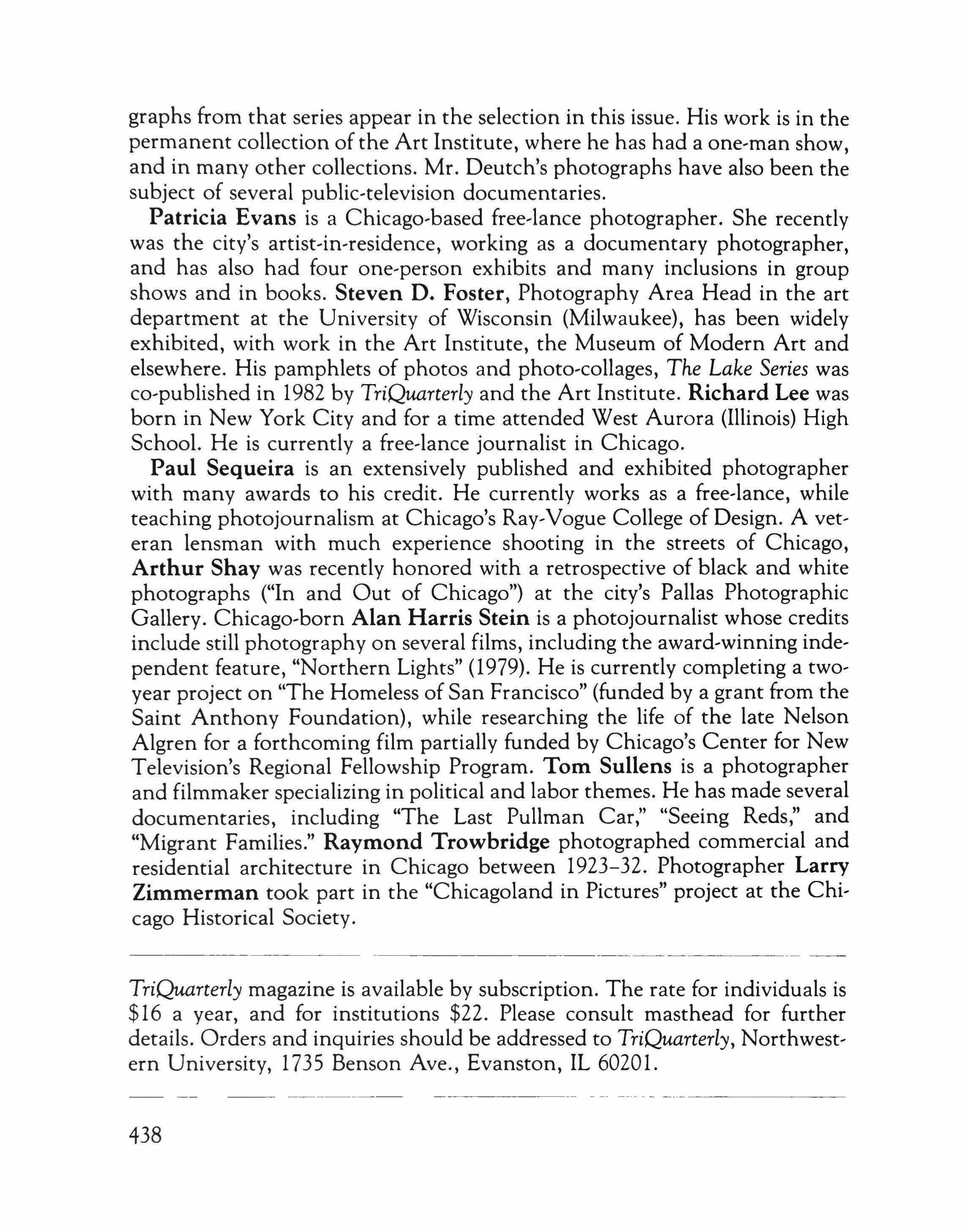
graphs from that series appear in the selection in this issue. His work is in the permanent collection of the Art Institute, where he has had a one-man show, and in many other collections. Mr. Deutch's photographs have also been the subject of several public-television documentaries.
Patricia Evans is a Chicago-based free-lance photographer. She recently was the city's artist-in-residence, working as a documentary photographer, and has also had four one-person exhibits and many inclusions in group shows and in books. Steven D. Foster, Photography Area Head in the art department at the University of Wisconsin (Milwaukee), has been widely exhibited, with work in the Art Institute, the Museum of Modern Art and elsewhere. His pamphlets of photos and photo-collages, The Lake Series was co-published in 1982 by TriQuarterly and the Art Institute. Richard Lee was born in New York City and for a time attended West Aurora (Illinois) High School. He is currently a free,lance journalist in Chicago.
Paul Sequeira is an extensively published and exhibited photographer with many awards to his credit. He currently works as a free-lance, while teaching photojournalism at Chicago's Ray-Vogue College of Design. A vet' eran lensman with much experience shooting in the streets of Chicago, Arthur Shay was recently honored with a retrospective of black and white photographs ("In and Out of Chicago") at the city's Pallas Photographic Gallery. Chicago'born Alan Harris Stein is a photojournalist whose credits include still photography on several films, including the award-winning independent feature, "Northern Lights" (1979). He is currently completing a two' year project on "The Homeless of San Francisco" (funded by a grant from the Saint Anthony Foundation), while researching the life of the late Nelson Algren for a forthcoming film partially funded by Chicago's Center for New Television's Regional Fellowship Program. Tom Sullens is a photographer and filmmaker specializing in political and labor themes. He has made several documentaries, including "The Last Pullman Car," "Seeing Reds," and "Migrant Families." Raymond Trowbridge photographed commercial and residential architecture in Chicago between 1923-32. Photographer Larry Zimmerman took part in the "Chicagoland in Pictures" project at the Chi, cago Historical Society.
TriQuarterly magazine is available by subscription. The rate for individuals is $16 a year, and for institutions $22. Please consult masthead for further details. Orders and inquiries should be addressed to TriQuarterly, Northwest, ern University, 1735 Benson Ave., Evanston, IL 60201.
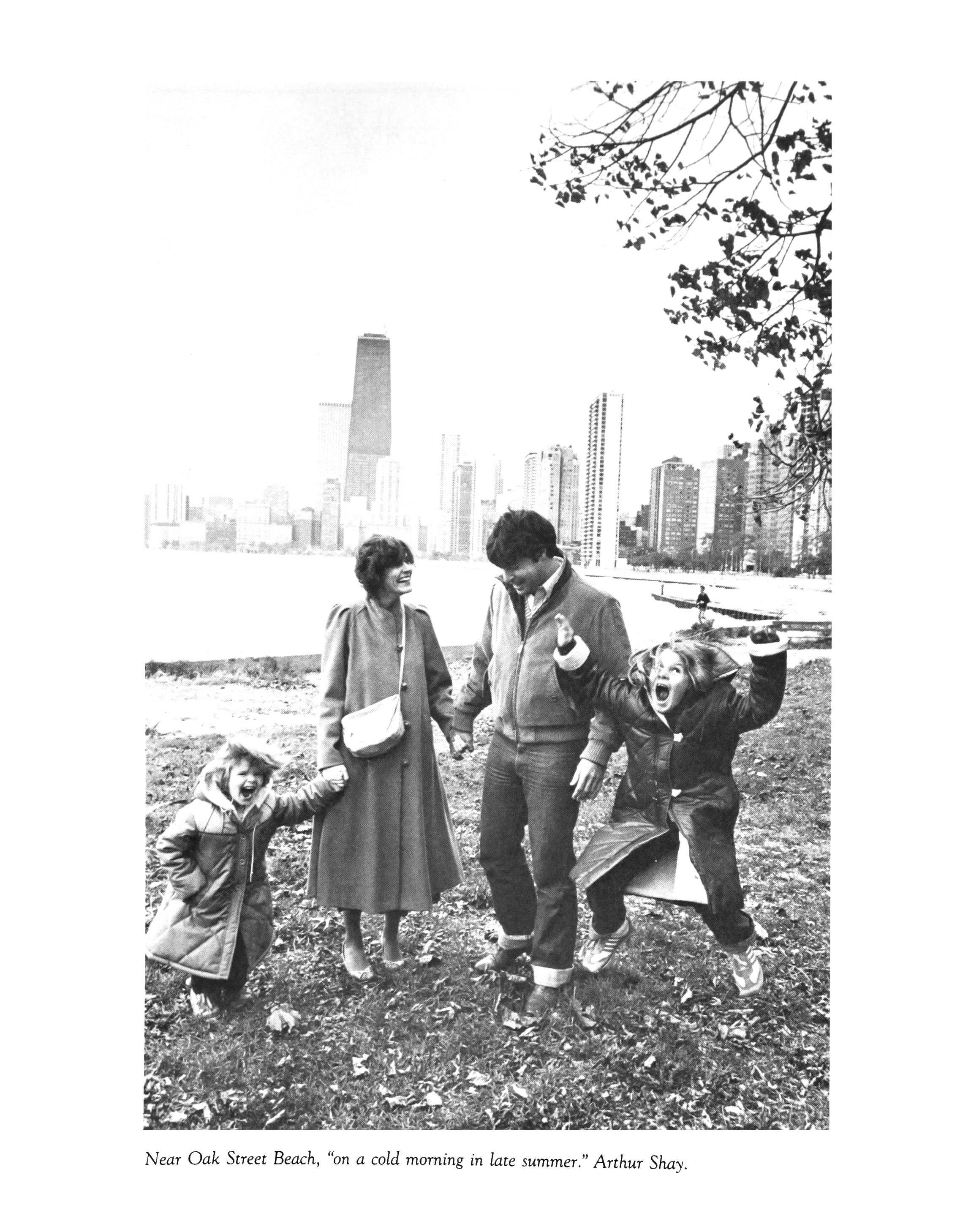 Near Oak Street Beach, "on a cold morning in late summer." Arthur Shay.
Near Oak Street Beach, "on a cold morning in late summer." Arthur Shay.

#22 Leszek Kolakowski special issue: co-edited by George Gomori. The first translations into English of this important Polish philosopher. 256 pp. $2.50
#25 Prose for Borges: a special issue with an anthology of writings by Borges and essays and appreciations by Anthony Kerrigan, Norman Thomas di Giovanni and others. 468 pp. $6.00
#26 Ongoing American Fiction I: features Stanley Elkin, Robert Coover, Thomas McGuane, Russell Edson, Alain Robbe-Grillet, Joyce Carol Oates, and Philip Stevick. 420 pp. $5.00
#29 Ongoing American Fiction II: stories by John Gardner, Joseph McElroy, Joy Williams, Gilbert Sorrentino, William Kittredge and others. 216 pp. $4.00
#30 A Context for Ongoing American Fiction: criticism by Albert J. Guerard, David Caute, Richard Pearce, Tony Tanner, John Hawkes and Philip Stevick. 140 pp. $4.00
#31 Contemporary Asian Literature: co-edited by Lucien Stryk. With Lu Hsun, Chairil Anwar, Ho Chi Minh, Shinkichi Takahashi, Yasunari Kawabata and others. 244 pp. $3.50
#33 Ongoing American Fiction III: James Purdy, David Kranes, Alan Sillitoe, Paul Bowles, Daniel Halpern, Morris Dickstein, Robert Alter and more. 340 pp. $3.50
#34 Ongoing American Fiction IV: Charles Newman, Ian McEwan, Robert Creeley, Gilbert Sorrentino, Ron Sukenick, Joseph McElroy, Robert Scholes and nine others. 256 pp. $3.50
#36 Ongoing American Fiction V: Robert Coover, Ursule Molinaro. Paul West, Ian MacMillan, Joyce Carol Oates. Peter Michelson. 256 pp. $5.00

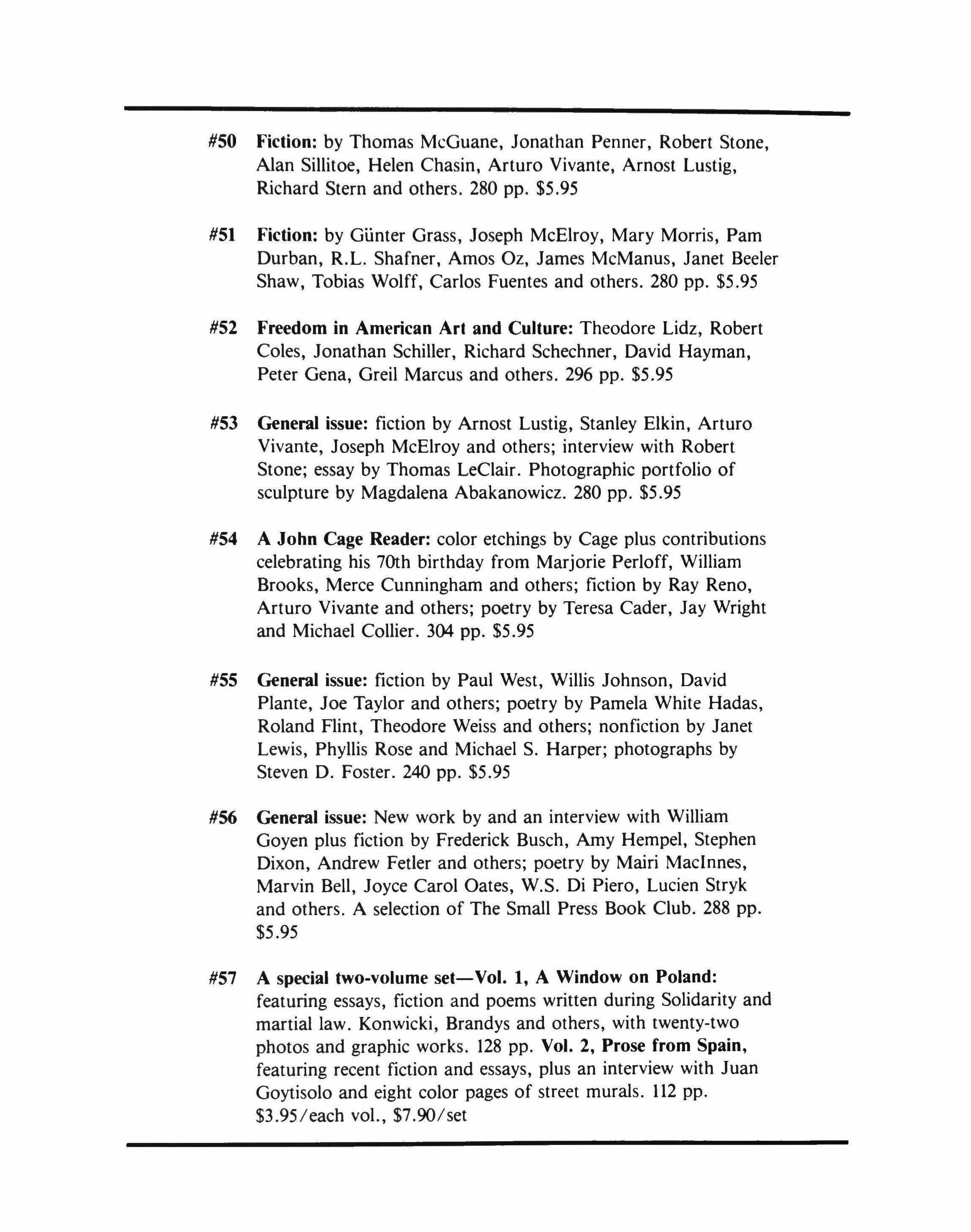
#SO Fiction: by Thomas McGuane, Jonathan Penner, Robert Stone, Alan Sillitoe, Helen Chasin, Arturo Vivante, Arnost Lustig, Richard Stern and others. 280 pp. $5.95
#SI Fiction: by GUnter Grass, Joseph McElroy, Mary Morris, Pam Durban, R.L. Shafner, Amos Oz, James McManus, Janet Beeler Shaw, Tobias Wolff, Carlos Fuentes and others. 280 pp. $5.95
#S2 Freedom in American Art and Culture: Theodore Lidz, Robert Coles, Jonathan Schiller, Richard Schechner, David Hayman, Peter Gena, Greil Marcus and others. 296 pp. $5.95
#S3 General issue: fiction by Arnost Lustig, Stanley Elkin, Arturo Vivante, Joseph McElroy and others; interview with Robert Stone; essay by Thomas LeClair. Photographic portfolio of sculpture by Magdalena Abakanowicz. 280 pp. $5.95
#S4 A John Cage Reader: color etchings by Cage plus contributions celebrating his 70th birthday from Marjorie Perloff, William Brooks, Merce Cunningham and others; fiction by Ray Reno, Arturo Vivante and others; poetry by Teresa Cader, Jay Wright and Michael Collier. 304 pp. $5.95
#SS General issue: fiction by Paul West, Willis Johnson, David Plante, Joe Taylor and others; poetry by Pamela White Hadas, Roland Flint, Theodore Weiss and others; nonfiction by Janet Lewis, Phyllis Rose and Michael S. Harper; photographs by Steven D. Foster. 240 pp. $5.95
#56 General issue: New work by and an interview with William Goyen plus fiction by Frederick Busch, Amy Hempel, Stephen Dixon, Andrew Fetler and others; poetry by Mairi Macinnes, Marvin Bell, Joyce Carol Oates, W.S. Di Piero, Lucien Stryk and others. A selection of The Small Press Book Club. 288 pp. $5.95
#S7 A special two-volume set-Vol. 1, A Window on Poland: featuring essays, fiction and poems written during Solidarity and martial law. Konwicki, Brandys and others, with twenty-two photos and graphic works. 128 pp. Vol. 2, Prose from Spain, featuring recent fiction and essays, plus an interview with Juan Goytisolo and eight color pages of street murals. 112 pp. $3.95/each vol., $7.90/set
#58 General issue: stories by Fred Chappell, Janet Kauffman, Perry Glasser and others; poetry by George Starbuck, C .K. Williams, Dave Smith and others; essays by William Goyen and Alan Shapiro; illustrations by Stan Washburn and Matthew Owens. 224 pp. $6.95
#59 The American Blues: fiction by Ward Just, Joyce Carol Oates, Gayle Whittier, Rodney Jones and others; poetry by Bruce Weigl, John Ciardi, John Frederick Nims, Maxine Kumin and others; photographs from Vietnam and of American political figures by Mark Godfrey; "Alberti and Others," a supplement of poetry and prose complementing Prose from Spain (#57, Vol. 2). 272 pp. $6.95
For orders of two or more books, deduct 20070 from total price. We pay postage on orders of three or more copies. (For orders of one or two books please add $1.00 for postage and handling.)
Note: While supplies last, an index to issues 1-50 is available on request, free of charge, with any order.
TriQuarterly. Northwestern University 1735 Benson Ave., Evanston, IL 60201
Please send me the following back issues of TriQuarterly:
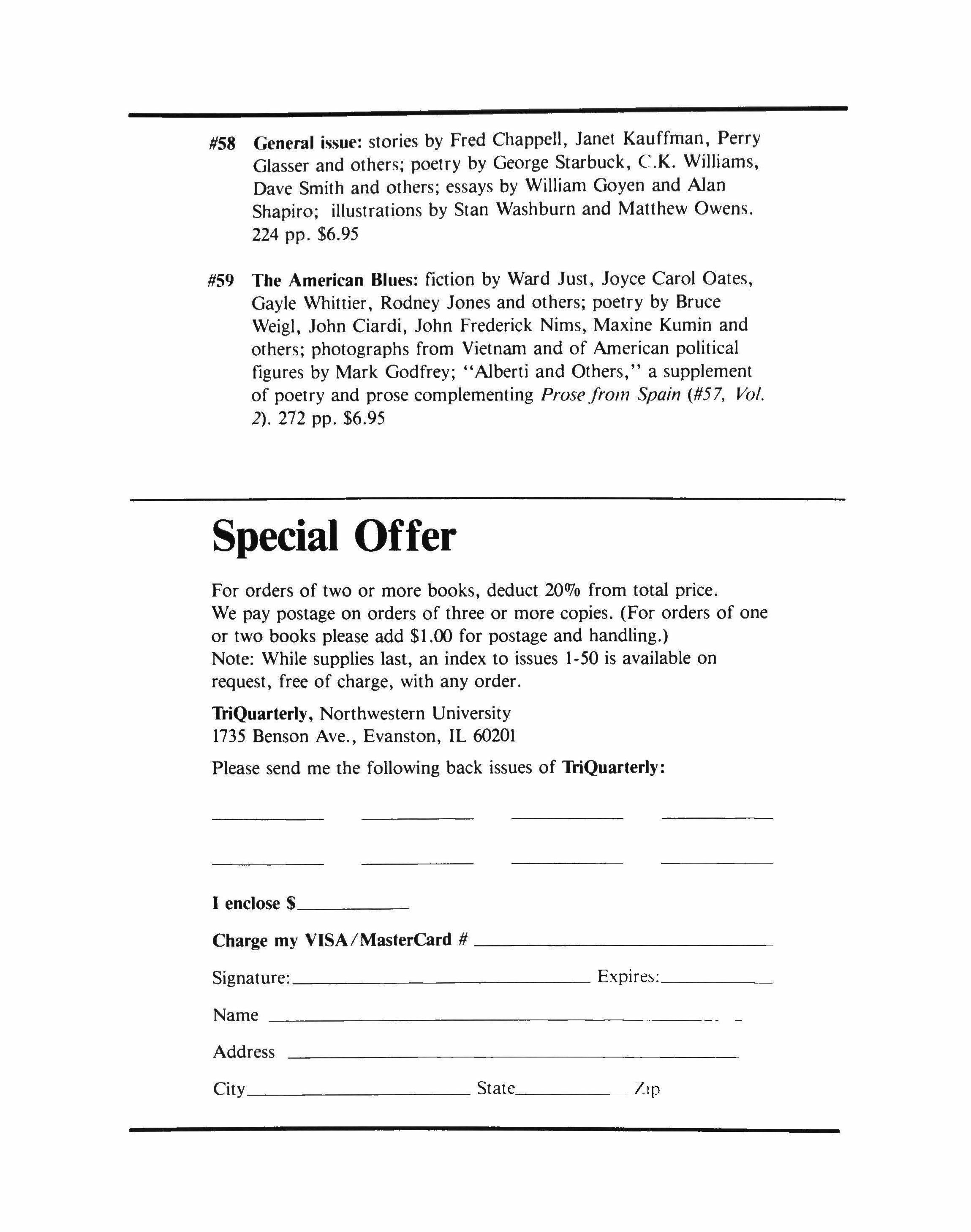
I enclose $
Charge my VISA/MasterCard #
Signature: Expires:
Name
Address
City State LIp


